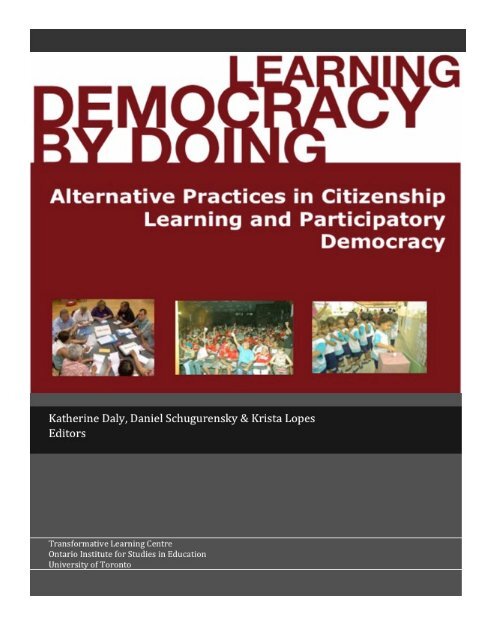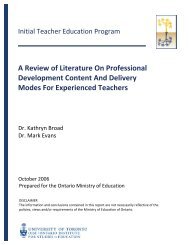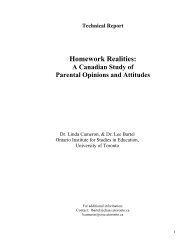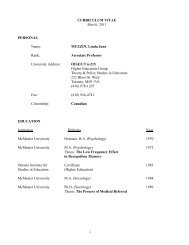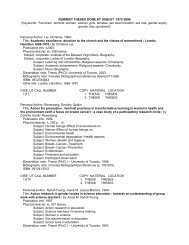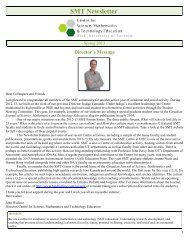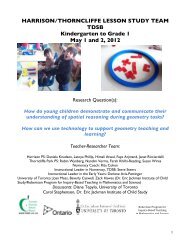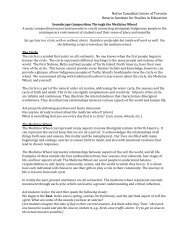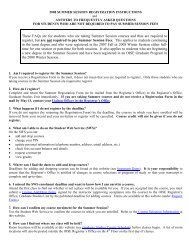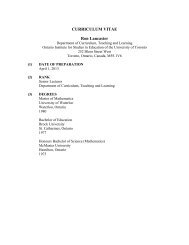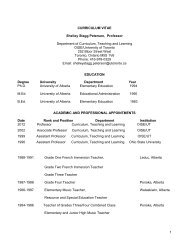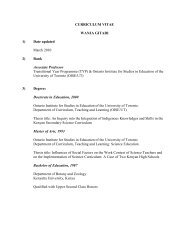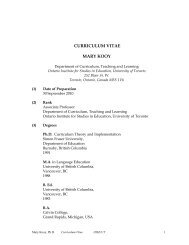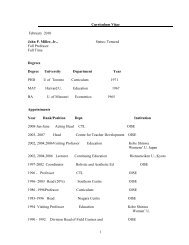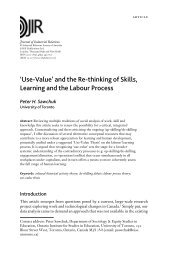Learning Democracy by Doing Conference - Transformative ...
Learning Democracy by Doing Conference - Transformative ...
Learning Democracy by Doing Conference - Transformative ...
You also want an ePaper? Increase the reach of your titles
YUMPU automatically turns print PDFs into web optimized ePapers that Google loves.
TableofContentsIntroduction.....................................................................................................................iSection1:Citizenship<strong>Learning</strong>andParticipatory<strong>Democracy</strong>:Debates,ConceptsandIssues ......................................................................................................................................1‘Active<strong>Learning</strong>forActiveCitizenship’,CommunityBased<strong>Learning</strong>andDemocraticCitizenship ...................................................................................................................................................................1JohnAnnette<strong>Learning</strong>for<strong>Democracy</strong>:ResuscitatingtheArgument .........................................................................11JimCrowther,IanMartin&MaeShawParticipatory<strong>Democracy</strong>andtheRenewalofRadicalPolitics..........................................................22StephenD'ArcyParticipación,PrácticasenSaludyProcesosdeAprendizajes:InvestigacionesenPsicologíayDemocracia ...........................................................................................................................................................30LeticiaGrippo,CarolinaScavino&CristinaChardon<strong>Learning</strong>Direct<strong>Democracy</strong><strong>by</strong>ParticipatingandVoting:TheRelationshipbetweenPoliticalCultureandDirect<strong>Democracy</strong>.........................................................................................................................39RolfRauschenbachCitizenshipParticipationandParticipatory<strong>Democracy</strong>:LimitsandPossibilities....................50DanielSchugurenskyDiscoursesofCommunityandParadoxesofParticipation:ChallengesforCitizenshipEducation...................................................................................................................................................................64GrietVerschelden,GreetDeBrauwere,LucDeDroogh&SvenDeVisscherAdvancing<strong>Democracy</strong>andHappiness:TheLeadershipDevelopmentFrameworksofDifferentTypesofCharismaticPoliticalLeadership..............................................................................73JohnnyWelch
Section2:<strong>Learning</strong><strong>Democracy</strong>inSchools ...........................................................................85AHistoricalReviewofCitizenshipEducationinBC’sSocialStudiesGuides...............................85CatherineBroomTeachingCitizenshipEducationinOntario:AHandbookforTeachersofElementarySchoolAgedChildren..........................................................................................................................................................98ElhamFarahDeliberativeMethodologyanditsRoleinDemocratic<strong>Learning</strong>intheProjectCitizenInitiative.................................................................................................................................................................. 104GabrielMurilloCastaño&NathaliaCastañedaAponteOnBecominganActiveandParticipatoryCitizen:AStudyonEducationandPoliticalSocializationinHongKong............................................................................................................................. 118ShunWingNgEducationalPolicyandChildren’sParticipation:AVoicetoConsider........................................ 130CarolaArrúe,NoraE.Elichiry&CarolinaSavinoFromAuthoritarianSchoolstoDemocraticSchools:TheRedLatinoamericanadeConvivenciaEscolar........................................................................................................................................... 139PatriciaCarbajalPadillaStudents,Bricks,andMortar:ExaminingtheInter‐relationships................................................. 148MeganConwayTheQualityofEducationinPublicSchoolsandtheJeopardizingofCitizenship:ImplicationsforBrazilian<strong>Democracy</strong> .................................................................................................................................. 157RanliceGuimaraesIosifStudentCouncilsatElementarySchoolsinIran:OneSteptowardsCitizenshipEducation................................................................................................................................................................ 166SamadIzadi&ZahraGooyaBuilding<strong>Democracy</strong>:ImplementingRestorativeCirclesinBrazilianSchoolsasaNonviolentConflictResolutionStrategy...........................................................................................................173PatríciaKriegerGrossi,BeatrizGerhensonAguinsky&MárioLimaGrossi
EducaciónCiudadanaUniversitariaDemocrática:AmbitoparalaReflexión‐Acción‐TransformacióndesdelaCulturadePaz.................................................................................................. 304OlgaCarolinaMolanoLucena<strong>Democracy</strong>andCampusLife:AUniversityoftheWestIndiesExperimenttoIncludeCommutingStudents......................................................................................................................................... 314JosephPereiraLaDemocratizaciónPedagógica:UnaExperienciaenEducaciónSuperior .............................. 323SilviaRibotdeFlores,CarmenVarguillas&ErnestinaBáezMeaningfulRelationshipsinPost‐SecondaryEducationalPractices:IndigenousStandpointPedagogy ................................................................................................................................................................ 331SuzanneL.StewartSection4:<strong>Learning</strong><strong>Democracy</strong>inNonFormalEducaiton ................................. 341Political<strong>Learning</strong>throughWomen’sExperiencesinLocalGovernments:TheCaseofCentralAmericanPathto<strong>Learning</strong>............................................................................................................................. 341MarthaBarriga“ICanSeetheChange”:TheCommunityTrainingPlanatTorontoCommunityHousing .. 352CarmenDownes,MarciaWilson,MarionThomson,TraceySeaward&KatherineJefferyNon‐FormalCitizenshipEducationinCapeTown:StrugglingtoLearnor<strong>Learning</strong>toStruggle? ................................................................................................................................................................. 363KristinEndresenGivingSpacetoParticipateandReflect:AdultLiteracyWorkers<strong>Doing</strong>Research‐in‐Practice ......................................................................................................................................... 373GuyEwing&SheilaStewartEnablingActiveCitizenshipthroughanAdultLeadershipDevelopmentProgram............... 382SharonZivkovicFormaciónDemocráticaparalaViabilidaddelosConsejosComunales:UnaExperienciaVenezolana............................................................................................................................................................. 394CarmentVarguillas,SilviaRibotdeFlores&ErnestinaBáez
IfIWerePresident:UsingPopularEducationasaToolforBuildingaDemocraticSociety............................................................................................................................................. 402RebeccaJanzenFormacióndeCompetenciasparalaConsolidacióndeCooperativascomoVíaparaelAprendizajeDemocráticoenelLugardeTrabajo:ElCasodeVenezuela .................................. 409ErnestinaBáez,CarmentVarguillas&SilviaRibotdeFloresSection5:<strong>Learning</strong><strong>Democracy</strong>inSocialMovementsandPoliticalParties.................................................................................................................................................................. 420LasPolíticasParticipativasdesdeelPuntodeVistadelasOrganizacionesSociales............ 420MartínCarné,AlbertoFord,CintiaPinillos,ValeriaSassaroli&ValeriaVenticinque<strong>Learning</strong>CivicEnvironmentalism<strong>by</strong><strong>Doing</strong>:ReflectionsfromActivists’ExperiencesinRuralOntario..................................................................................................................................................................... 427SuzanneL.CookTheRootsofEngagedCitizenship<strong>Learning</strong>:ConfrontationswithMurderousInjustice,withReferencetoArgentinaandColombia....................................................................................................... 439DieterMisgeldParticipatory<strong>Democracy</strong>andEcojustice:FramingaViewofHealthy<strong>Learning</strong>OrganizationsthroughComplexityScience ............................................................................................ 451DarrenStanley&KellyYoungProgramadeCapacitaciónyFormaciónenCulturaEscolarparalaPaz.................................... 460BelkisMendozadeGómez&DanielaDonadiTheStruggleofNGOsinPakistanforPro‐PeopleLegislation......................................................... 470MirzaAbdulShakoorHowandWhydoWomen’s/FeministMovementsinEcuadorUsetheInternet? .................. 475MariaSvenning<strong>Democracy</strong>inSocialMovements:<strong>Learning</strong>throughProtest .......................................................... 483L.DeborahSword
PoliticalPartiesasVoluntarySocialServiceOrganisations:AlternativeProcessesofRecruitmentforQualityParticipationinPoliticalPartiesinIndia ............................................... 492VinaySahasrabuddheSection6:<strong>Learning</strong><strong>Democracy</strong>inLocalCommunities .......................................... 503PraxisandPlaceinFedUp:Windsor'sLocalFoodActivism ............................................................ 503JameyEssex&MayaRugglesWorksplace<strong>Democracy</strong>andSolidarityDevelopment:AnEmpiricalStudyofVenezuelanCooperatives ......................................................................................................................................................... 510CamilaPiñeroHarnecker<strong>Learning</strong>DemocraticCitizenship:NeighbourhoodsasKeyPlacesforPracticingParticipatory<strong>Democracy</strong>................................................................................................................................. 525LakeSagaris<strong>Learning</strong>InterculturalUnderstandinginPublicPlaces..................................................................... 543LindaDaleBloomberg,ChristinaCataldo,MariaCseh,BridgetO'onnor,VictoriaMarsick,PeterNeaman,RuudvanderVeen,MarieVolpe,JanetW.YoungbloodMobilizingfor<strong>Democracy</strong>throughNurturingDemocraticIntelligence..................................... 551KathleenKevanyGrupoArteNuevodeParaguay:ReservadePrácticasDemocráticasenunContextoAutoritario ............................................................................................................................................................. 561ÁngelMarianoJaraOviedoCitizenEngagementandElectionsinNigeria:<strong>Learning</strong><strong>Democracy</strong>through<strong>Transformative</strong>TheatreandSoccer............................................................................................................................................. 567TorIorapuuOpeningSpacesforAlternativeCitizenship:BringingInvisibleBodiestothePublicthroughArt.............................................................................................................................................................................. 580MabelLlevat
AprendiendoaTransgredirNormasDemocráticas:UnEstudiosobrelaSocializaciónPrimariaenArgentina ...................................................................................................................................... 589AnaVernengoVillaElisaDemocraticPracticesandTransitionalSpacesinaPublicArtProject........................................ 597AstridvonKotzeSection7:<strong>Learning</strong><strong>Democracy</strong>throughGovernance ............................................. 607FromObjectstoSubjectstoParticipants:WomenandGenderedGovernanceinKerala’sParticipatory<strong>Democracy</strong>................................................................................................................................. 607ManjulaBharathiTheVariableGeometryofParticipatoryBudgeting:WhichLessonsfromthenewPortugueseExplosion?......................................................................................................................................623NelsonDias&GiovanniAllegrettiVariationsandEffectsofExperimental<strong>Democracy</strong>:NeighbourhoodAssembliesandParticipatoryBudgetinginRosario ............................................................................................................ 638AlbertoFordParticipatory<strong>Democracy</strong>andPolitical<strong>Learning</strong>:LessonsfromtheBrazilianExperience ........................................................................................................................................................... 650LígiaHelenaHahnLüchmannCivic<strong>Learning</strong>inState‐SponsoredInstitutions:AccountingforVariationintheBritishColumbiaandOntarioCitizens’AssembliesonElectoralReform................................................. 663AmyLang<strong>Democracy</strong>,Participationand<strong>Learning</strong>:TheCaseofVenezuela................................................... 677ManuelLarrabure<strong>Learning</strong><strong>Democracy</strong>throughParticipatoryBudgeting:WhoLearnsWhat,andSoWhat? ....................................................................................................................................................... 686JoshLernerConstruccióndeCiudadaníaDemocráticayProyectosEducativosUrbanos:LaExperienciadelasCiudadesEducadoras…………………………………………………………………………………….......694PabloMonteroSouto
Civic<strong>Learning</strong>andPoliticalEngagementthroughParticipatoryBudgeting:TheCaseofGuelph,Canada .................................................................................................................................................... 706ElizabethPinnington&DanielSchugurenskySchoolsof<strong>Democracy</strong>:HowOrdinaryCitizensbecomeCompetentinParticipatoryBudgetingInstitutionsinEurope................................................................................................................. 721JulienTalpinParticipative<strong>Democracy</strong>inMunicipalGovernance............................................................................. 735DonaldW.deGuerre&AndrewS.TrullSection8:<strong>Learning</strong><strong>Democracy</strong>inGlobalContext...................................................... 746Citizenship,GlobalizationandMigration:ImplicationsforGlobalCitizenshipEducation. 746KatherineDalyNorth‐SouthCity‐to‐CityCooperationinthefieldofSustainableDevelopmentandLocalAgenda21:<strong>Transformative</strong>Citizenship<strong>Learning</strong>throughInternationalPartnerships ..... 757UlrikeDeversKanogluTheGlobalisationofCitizenship:ExploringtheRelevanceof‘Citizenship’forYoungPeople ........................................................................................................................................................ 767SamanthaRatnamBetweenCitizenParalysisandPraxis:TowardaCriticalPedagogyforConfrontingGlobalViolence................................................................................................................................................................... 777AdamDavidsonHardenDemocraticAccountabilityinEducationforDevelopmentCanadianINGOsandClaimsofParticipatoryLegitimacy ................................................................................................................................. 795GaryW.J.Pluim
IntroductionPracticesandunderstandingsofdemocracy,citizenship,andcitizenshipeducationareintransition.Ontheonehand,lowervoterturnouts,decliningcitizenconfidenceinthepoliticalestablishment,andcriticismsabouttheabilityofrepresentativedemocracytoensuresocialinclusionandequalityofopportunityforallhavesparkedvigorousdebatesaboutwaystoaddresstheso‐called“democraticdeficit.”Inthefieldofeducation,therehavebeenparalleledgrowingconcernsaboutthelimitationsoftraditionalciviceducationmodelsthatfocusonthememorizationoffactstonurtureacritical,caringandengagedcitizenry.Ontheotherhand,inthelasttwodecades,innovativeexperimentsinparticipatorydemocracyandcitizenshipeducationhaveproliferatedinschools,universities,civilsocietyorganizations,socialmovements,co‐operatives,workplaces,localandregionalgovernment,andmanyotherspaces.Likewise,therehasbeenanincreasingawarenessofthepotentialthatopportunitiesforcollectivelearningindemocraticspaceshavetoadvancethecommongood,topromotehumandevelopment,andtocomplementtheinstitutionsofrepresentativedemocracywiththeinsightsofassociativeintelligence.Despitethesurgeinthepracticeoftherapidlyexpandingfieldsofparticipatorydemocracyandcitizenshiplearning,thisremainsalargelyunder‐researchedfield,wherenetworksforknowledge‐sharingandcollaborationremainnascent.Toaddresstheseissuesandprovideaforumfortheseincipientnetworks,the<strong>Transformative</strong><strong>Learning</strong>Centre(TLC)hasorganizedtwointernationalconferencesoncitizenshiplearningandparticipatorydemocracy,bothheldattheOntarioInstituteforStudiesinEducation(OISE)oftheUniversityofToronto.Thefirstconference,titled“Lifelongcitizenshiplearning,participatorydemocracyandsocialchange:localandglobalperspectives”,tookplaceinOctober2003,anditsproceedingsareavailableonline,ontheconferencewebsite(http://tlc.oise.utoronto.ca/conference2003/intro.html).ThesecondinternationalconferencewasheldinOctoberof2008,ontheoccasionofthe15 th anniversaryoftheTLC,andwasentitled“<strong>Learning</strong><strong>Democracy</strong><strong>by</strong><strong>Doing</strong>:AlternativePracticesinCitizenshipEducationandParticipatory<strong>Democracy</strong>”.Thereferenceto‘learning<strong>by</strong>doing’paystributetoeducatorslikeJohnDewey,whoproposedthatdemocracyisacommunityprocessandthatthroughtheexperienceofparticipatingindemocraticdecision‐makingprocessescitizenscouldtrulylearnthevalueofdemocracyandacquirethecapacitiestoforfullyandmeaningfulparticipation.The“<strong>Learning</strong><strong>Democracy</strong><strong>by</strong><strong>Doing</strong>”conferencebroughttogetherresearchersandpractitionersinterestedinthetheoreticalandpracticalaspectsofcitizenshipeducationandparticipatorydemocracy,andcommittedtotheprojectofnurturinganenlightenedandactivecitizenship,ontheonehand,andtheprojectofdeepeningdemocracy,ontheother.Theconferenceattractedover250participantsfromallovertheworld.Becauseworkinthesefieldsisbeingcarriedoutacrossmanydisciplines,theconferencedrewparticipationi
fromdifferentsectors,includingacademicresearchers,teachersinalllevelsoftheeducationsystem,adulteducators,communitydevelopmentworkers,urbanplanners,communityorganizers,andavarietyofgovernmentalandnon‐governmentalorganizationsinvestedinimprovinglocaldemocracyaswellascapacitybuildingforlocaldemocracy.WewereveryhappytowelcomemanyparticipantsfromtheGlobalSouth.Thispublicationincludesmanyofthepresentationsmade<strong>by</strong>theconferenceparticipants.Thecollectionof75papersreflectsthethinkingofacademicsandpractitionersfromaroundtheworldaboutthecurrentinnovationsindemocraticpractices.Withafewexceptions,thepapersarepublishedintheoriginallanguageinwhichtheywerewritten.Thepublicationarisesoutoftherichexperienceoftheconferenceparticipantswhogatheredtosharetheirinsightsintothetheoreticalandpracticalimplicationsofinnovativethinkingaboutdemocracy,participationandcitizenship.Furthermore,thepapersbringtheseissuesintoaninternationalfocus<strong>by</strong>presentingexperimentsfromdiversearenasaroundtheworld.WhetherdiscussingstudentcouncilsinIran,participatoryapproachestoworkertraininginToronto,thepromotionofwomen’sleadershipinCentralAmericaornon‐formalcitizenshipeducationinSouthAfrica,thecommonthemeremainsapreoccupationwithapressingquestion:Howcandemocracy,participationandcitizenshipbere‐formulatedandpracticedtopromoteabetterworld?Thiscollectionisorganizedintoeightsectionsthatreflectthebroadthemesdiscussedatthe“<strong>Learning</strong><strong>Democracy</strong><strong>by</strong><strong>Doing</strong>”<strong>Conference</strong>.Theyareasfollows:1. <strong>Learning</strong><strong>Democracy</strong>:ConceptualDiscussions,DebatesandIssues2. <strong>Learning</strong><strong>Democracy</strong>inSchools3. <strong>Learning</strong><strong>Democracy</strong>inHigherEducation4. <strong>Learning</strong><strong>Democracy</strong>inNon‐FormalEducation5. <strong>Learning</strong><strong>Democracy</strong>inSocialMovementsandPoliticalParties6. <strong>Learning</strong><strong>Democracy</strong>inLocalCommunities7. <strong>Learning</strong><strong>Democracy</strong>inLocalandProvincialGovernance8. <strong>Learning</strong><strong>Democracy</strong>inGlobalContextThepapersofthefirstsectiondiscussissuesrelatedtodemocracy,citizenship,participatorydemocracyandcitizenshipeducation.Someauthorsassesshowcurrentpracticescanbere‐directedtoemphasizethedevelopmentofmorecritical,caringandglobally‐mindedcitizens.Theseauthorsdrawinsightsfromdifferenttheoreticalperspectivestoinformthepracticeofteachingandlearningfordemocraticcitizenship,andthemeaningofdemocracyitself.Thesecondsectionexploresdiverseexperimentswithparticipatorydemocraticpracticesinschoolssettings(K‐12)andtheeffectsthattheseexperiencesarehavingonthecitizenshipofchildrenandyouth.Thethirdsectionfocusesonsimilarexperiencesinthecontextofhighereducation(includinguniversityacademicprogramsandteachertraining),whereasthefourthsectiondealswithnon‐formaleducationinitiatives.Thefifthsectiondiscussesthedemocraticandpoliticallearningthatoccursthroughparticipationinsocialmovementsandpoliticalparties.Thesearticlesmakeamodestcontributiontotheincipientliteratureonafieldknownas“socialmovementlearning”.Theii
sixthsectionexploresthepoliticalandciviclearningthattakesplaceinlocalcommunities,betheycooperativeworkplaces,communitygroups,neighbourhoodassociations,andavarietyofpublicspacesandcivilsocietyorganizations.Thepapersoftheseventhsectiondealwithcitizenshiplearningthroughexperimentsinlocalgovernanceandstatesponsoredinitiatives,includingparticipatorybudgetingexperimentsinLatinAmerica,EuropeandCanada,citizen’sassemblies(“randomocracy”),andtheKeralamodeloflocalgovernanceinIndia.Theeightandlastsectionincludespapersthatexplorecitizenshiplearninganddemocracyinglobalcontext,includingissuesofmigration,internationalexchanges,internationaldevelopment,andglobaleducation.Wehopethattheseworkswillcontributetothegrowingresearchandinterestininnovationsinparticipatorydemocracyandcitizenshipeducationaroundtheworld.Inthespiritoftheconference,ourgoalinsharingthisworkistoinspirepractitionersandtheoriststocontinuegrapplingwiththecomplexitiesofsocialchangethroughreflectingonthetheoriesandthepracticesofdemocracy.DanielSchugurensky,KatherineDalyandKristaLopes,editors<strong>Transformative</strong><strong>Learning</strong>Centre,OISE/UTToronto,June2009iii
Section1:Citizenship<strong>Learning</strong>andParticipatory<strong>Democracy</strong>:Debates,ConceptsandIssuesPapersubmittedtotheconference<strong>Learning</strong><strong>Democracy</strong><strong>by</strong><strong>Doing</strong>AlternativePracticesinCitizenship<strong>Learning</strong>andParticipatory<strong>Democracy</strong><strong>Transformative</strong><strong>Learning</strong>Centre,OISE/UT,October1618,2008Pleasedonotquotewithoutpermission‘Active<strong>Learning</strong>forActiveCitizenship’,CommunityBased<strong>Learning</strong>andDemocraticCitizenshipJohnAnnetteUniversityofLondonCitizenshipEducationandtheConceptofCitizenship,EverydayPoliticsandCivicEngagementItcouldbearguedthattheconceptionofcitizenshipunderlyingUKlifelonglearningforcitizenshipshouldbeacivicrepublicanonewhichemphasisesdemocraticpoliticalparticipation.ThisreflectstheinfluenceofBernardCrickandtheex‐MinisterDavidBlunkett.OneofthekeychallengesfacingtheintroductionofcitizenshipeducationintheUKisthequestionaboutwhetherandinwhatrespectscitizenshipis‘British’.ElizabethFrazerhaswrittenaboutthe‘Britishexceptionalism’towardsdiscussingcitizenship(Frazer1999a).DavidMiller(2000)writesthatCitizenship‐exceptintheformalpassport‐holdingsense‐isnotawidelyunderstoodideainBritain.Peopledonothaveaclearideaofwhatitmeanstobeacitizen…Citizenshipisnotaconceptthathasplayedacentralroleinourpoliticaltradition.(p.26)ThequestionconcerningtowhatextentBritishpeoplearefamiliarorcomfortablewiththeconceptofcitizenshipraisesquestionsabouttheextenttowhichthepoliticallanguageofcitizenshipandcivicrepublicanismcanincreasinglybeseenasatraditionof‘British’politicalthoughtwhichcanprovidethebasisforatransformationofthemoredominantliberalindividualistpoliticaltraditions.IntheUKthecurrent‘NewLabour’governmenthasespousedaprogrammeofcivilrenewalthatlinksthepublic,privateandvoluntaryandcommunitysectorstoworkforthecommongood.Thisinitiativeisinformed<strong>by</strong>asetofbeliefsandvaluesinvolvingfaith1
‘Active<strong>Learning</strong>forActiveCitizenship’ Annettetraditions,ethicalsocialism,communitarianismandmorerecentlycivicrepublicanism.AccordingtoDavidBlunkett(2003),duringhistenureasHomeSecretary,The‘civicrepublican’traditionofdemocraticthoughthasalwaysbeenanimportantinfluenceforme…Thistraditionoffersusasubstantiveaccountoftheimportanceofcommunity,inwhichdutyandcivicvirtuesplayastrongandformativerole.Assuch,itatraditionofthinkingwhichrejectsunfetteredindividualismandcriticisestheelevationofindividualentitlementsabovethecommonvaluesneededtosustainworthwhileandpurposefullives.Wedonotenterlifeunencumbered<strong>by</strong>anycommunitycommitments,andwecannotliveinisolationfromothers.”(Blunkett2003,19)Itisthiscivicrepublicanconceptionofpolitics,whichIwouldargueanimateskeyaspectsofNewLabour’spoliciesfromcitizenshipeducationtoitsstrategytowardsrevitalisinglocalcommunities.RichardDagger,inhisinfluentialstudyofciviceducation,arguesthatacivicrepublicanconceptionofcitizenshipcanreconcilebothliberalindividualityandthecultivationofcivicvirtueandresponsibility:Thereistoomuchofvalueintheideaofrights‐anidearootedinfirmandwidespreadconvictionsabouthumandignityandequality‐toforsakeit.Thetask,instead,istofindawayofstrengtheningtheappealofduty,communityandrelatedconceptswhilepreservingtheappealofrights.(Dagger,1997,p.58andcf.Maynor2003)Thecreationofasharedpoliticalidentityunderlyingcitizenshipshouldalsoallowformultiplepoliticalidentitiesbasedongender,race,ethnicity,socialexclusion,forexample.Itmaybethatthecivicrepublicanpoliticsofcontestability,asrecentlyarguedfor<strong>by</strong>PhilipPettit(1997),mayprovideamorepluralistbasisforcitizenshipincontemporaryBritainthantraditionalrepublicanpolitics.Equally,recenttheoristsofliberaldemocracylikeEamonnCallan(1997)alsoarguethataneducationforcitizenshipmustholdfasttoaconstitutiveidealofliberaldemocracywhileallowingforreligiousandculturalpluralism.Thismoredifferentiatedbutuniversalconceptofcitizenship(Lister1997and1998),encouragescivicvirtueandparticipation,whilemaintainingindividuallibertyandallowingforculturaldifference,willcreateawayofunderstandingcitizenshipthatisappropriateforaneducationforcitizenshipanddemocracy.ItcouldbearguedthattherecentestablishmentofaneducationforcitizenshipinEnglandmaybebasedmoreonacommunitarianconcernformoralandpoliticalsocialisationthanpromotingcivicengagement.FollowingElizabethFrazer’sdistinctionbetweena‘philosophicalcommunitarianism’anda‘politicalcommunitarianism’(Frazer1999b;cf.Tam1998and2001),AdrianLittle(2002)raisessomeimportantquestionsabouttheapoliticalconceptionofcommunityincommunitarianism.HewritesthatAssuch,thesphereofcommunityisoneofcontestationandconflictasmuchasitisoneofagreement.Thus,essentially,itisdeeplypolitical.Whereorthodoxcommunitariansseepoliticsassomethingtobeovercometothegreatestpossibleextent,radicalsarguethatthedownwarddevolutionofpowerwillentailmorepoliticsratherthanless.(Little,2002,p.154)2
‘Active<strong>Learning</strong>forActiveCitizenship’ AnnetteIntheirstudiesofthepoliticalcommunitarianism,bothLittleandFrazerconsidertherevivalofcivicrepublicanismasemergingfromthedebatebetweenliberalandcommunitarianconceptionsofthepoliticsofcommunity.Incivicrepublicanism(cf.Oldfield1990andMaynor2003)freedomconsistsofactiveself‐governmentandlibertyrestsnotsimplyinnegativelibertybutinactiveparticipationinapoliticalcommunity. IntheUSAthisdebateisalsoreflectedinthewritingsofBenjaminBarber(1984,1998a,1998b),MichaelSandel(1996)andWilliamGalston(2001),whichhavebeenpromotingacivicrepublicanconceptionofcitizenship.AccordingtoBarber(1992)afundamentalchallengeofcontemporarysocietiesistoprovidecitizenswiththeliteracyrequiredtoliveinacivilsociety,thecompetencetoparticipateindemocraticcommunities,theabilitytothinkcriticallyandactdeliberatelyinapluralistworld,andtheempathythatpermitsustohearandthusaccommodateothers.Allthisinvolvesskillsthatmustbeacquired.JosephKahneandJoelWestheimer(2003)recommendamodelofcitizenshipeducationbasedontheprinciplesofsocialjusticeandHarryBoyte’s(2004)modelbasedontheconceptof‘publicwork’Thisdebateaboutwhatisanappropriatemodelof‘citizenship’forcitizenshipeducationraisesquestionsabouttheneedforstudentstomovebeyondindividualisticandconsumerconceptionsofcitizenshiptowarddevelopingamodelof‘civicrepublican’anddemocraticcitizenshipeducationThisreconsiderationoftheconceptofcitizenshipandcitizenshipeducationshouldalsobeinformed<strong>by</strong>therecentworkonthe‘politicsofeverydaylife’whichcanbroadenourunderstandingwhat‘thepolitical’couldmeaninthelivesofallcitizens.(Crick2005;Bentley2005;Boyte2004;Ginsbourg2005;Stoker2006)Weneedmoreresearchabouthowpeopleunderstandthe‘political’asitrelatestotheireverydayconcernsintheircommunities,comparedwiththemoreformalpoliticalsphereofvoting,politicalpartiesandholdingpublicoffice.ThisbroaderconceptionofthepoliticalreflectsadeclineofformalpoliticalparticipationandlackoftrustinformalpoliticsatatimewhenthereisevidenceofcontinuingformsofcivicengagementwhichmayescapetheradarofRobertPutnam’sresearchintosocialcapital(cf.Putnam2000;SirianniandFriedland2004and2005;PowerInquiry2006)Thisalsoreflectstheimportantdistinctionthatshouldbemadebetweenvolunteeringleadingtoactivecitizenshipandamoredeliberatelypoliticalformsofcivicengagementincommunitywhichcanleadtodemocraticcitizenship.IntheUSAandnowbeginningintheUK,academicsareviewingservicelearningorcommunitybasedlearningasanimportantpartofaneducationforactivecitizenship,whichIwouldarguecanbebasedeitheronamore‘communitarianconception’ofcitizenship(volunteeringorcommunityservice)oramore‘politicalorcivicrepublican’conceptionofcitizenship(civicengagementandnon‐formalpoliticalparticipation).‘Politics’andCommunityInvolvement3
‘Active<strong>Learning</strong>forActiveCitizenship’ AnnettethatInhisshortbookondemocratictheory,BernardCrick(2002)expressedaconcernTheinterpretationof“communityinvolvement”thatunderpinstheCitizenshipcurriculumwillinvolveaconceptionofthecommunitythatseesitsimplyasaplaceorneighbourhoodwherestudentsaremerely‘active’:doinggoodratherthanpoliticalgood(ieinformed,effectivecitizens.Thatis,thenewcurriculumwillresultinformsofvolunteeringthatwillfailtochallengethestudentstothinkandact‘politically’(p.115).Incontemporarypoliticalthinking,theconceptofcommunityhasbecomebothphilosophicallyand‘politically’significant.CommunityhasalsobecomeincreasinglythefocusofgovernmentpolicyintheUKandtheUSA.Fromthe‘Third‐Way’communitarianismofNewLabourortheNewDemocrats,totheemergenceofcommunitarian‐based‘CompassionateConservatism’,theideaofcommunityisnowseenasakeytorethinkingtherelationshipbetweencivilsocietyandthestate.Governmentsocialpolicyconcerningneighbourhoodrenewalandurbanrenaissancestressestheroleofcitizensininnercityareasindesigningandrebuildingtheircommunities(SirianniandFriedland2004;Taylor2003).LinkedtothischallengeistheperceivedsenseofthelossofcommunityincontemporaryBritishsociety.Thislostsenseofcommunityalsounderliestheideaofsocialcapital,whichhasrecentlybeenpopularised<strong>by</strong>RobertPutnaminhisstudyofthedeclineofcivicengagementandsocialcapitalintheUSA(Putnam2000).Theconceptofsocialcapitalhasprovidedatheoreticalbasisforunderstandingtheimportanceofcommunity,which,accordingtotheneo‐TocquevilliananalysisofRobertPutnamandhiscolleagues,hasimportantconsequencesforcitizenshipandpoliticalparticipation.WhilePutnamandothershaveanalysedthedeclineoftraditionalvolunteeringintheUSAitisinterestingtonotethatintheUKtherehasbeenamuchsmallerdecline(Hall2002andPutnam2002).Incontemporarypoliticalandsociologicaltheorytherehasbeenarenewedinterestintheideaofcommunity(Bauman2001;Delanty2003).Theconceptofcommunityisanelasticconcept,whichallowsforanenormousrangeofmeanings.Fromvirtualcommunitiestoimaginarycommunitiesthereareconceptualunderstandingsofcommunitytobefoundinawiderangeoftraditionsofthoughtandacademicdisciplines.Iwouldarguethatthereareatleastfourmainwaysofconceptualisingcommunity.(Thereareanumberofcontemporarywriterswhoofferalternativewaysofrepresentingthevaryingunderstandingsofthemeaningofcommunity(cf.Delanty2003;Nash2002;Taylor2003.)Thefirstistoconsidercommunitydescriptivelyasaplaceorneighbourhood.Thesecondistotalkofcommunityasanormativeideallinkedtorespect,solidarityandinclusion,whichcanbefoundinthenowwell‐establisheddebatebetweenliberalismanditscommunitariancritics.(MulhallandSwift1996)Thethirdwayofunderstandingcommunityisbasedontheconstructionofculturalidentitiesandcanbefoundincommunitiesof‘interest.’Thisconceptionisbasedonapoliticsofidentityandrecognitionofdifference.Thefourthwayistoconsidercommunityasapoliticalideal,whichislinkedtoparticipation,involvementandcitizenship,especiallyonthelevelofthecommunity.4
‘Active<strong>Learning</strong>forActiveCitizenship’ AnnetteItisthecase,ofcourse,thattheseconceptualunderstandingsofcommunityareoftenelidedandcombinedtoproducehybridconceptualisationsofcontemporarycommunity.Thusapoliticalunderstandingofcommunitymaybebasedinaspecificneighbourhoodwherethereare‘publicplaces’andmayincludeavarietyofcommunitiesofidentityorinterest.Itisalsothecasethatpoliticalcommunitarianismcanbeunderstoodthroughtheanalysisofthepoliticsofcommunityintermsofliberalism,communitarianismorcivicrepublicanism.Advocatesofbothcommunitarianismandcivicrepublicanismhaverecentlybeguntorevivetheideaofacivicservicelinkedtotheidealofservicetothelocalcommunity.InBritain,anumberofauthorshavearguedforanationalvoluntaryCitizen'sServiceinitiative.Morerecently,intheUSA,therehasbeenarenewedinterestinestablishingaformofnationalservice,whichwouldbuildonthesuccessoftheAmericorpsprogrammeoftheCorporationforNationalService(Dionne,Jr.,et.al.2003andBlunkett2008).SusanStroud,basedonherpreviousworkfortheFordFoundation,hasalsobeenexploringthisthemeinternationally(cf.www.icip.org).Civil/CivicRenewalandActiveCitizenshipDavidBlunkett,inhisEdithKalmMemorialLectureandvariouspublicationsandspeeches,hascalledforanewcivicrenewal,orcivicengagement,whichemphasizesnewformsandlevelsofcommunityinvolvementinlocalandregionalgovernance.Thisworkhasbeencarriedon<strong>by</strong>HazelBlears,MinisterfortheDepartmentforCommunitiesandLocalGovernment,aspartofitscommunityempowermentstrategy.Thisnewdemocraticpolitics,whichwouldincludereferendums,consultativeactivities,anddeliberativeparticipation,hasfoundsupportfromorganizationsasdiverseastheLocalGovernmentAssociationandtheprominentthinktankInstituteforPublicPolicyResearch(IPPR2004).Oneoutcomeofthisshiftinthinking,whichmightbetermedaswitchfromgovernmenttogovernance,istheobligationuponlocalauthoritiestoestablishLocalStrategicPartnerships,adutyarisingfromtheLocalGovernmentActof2000.Thesepartnershipsseektoinvolvelocalcommunitiesinthedevelopmentofcommunitystrategies.Previously,theHomeOfficeestablishedaCivilRenewalUnit,whichhasbegunpilotingan‘Active<strong>Learning</strong>forActiveCitizenship’programmethroughwhichitisintendedthatadultlearnerswilldevelopthecapacitytoengageindeliberativedemocracyatalocallevel.ThisunitisnowtheCommunityEmpowermentUnitintheDepartmentforCommunitiesandLocalGovernmentandthe‘TogetherWeCan’cross‐departmentalstrategyisbeingsupported<strong>by</strong>thenew‘CommunityEmpowermentStrategy’.(cf.Brannan,et.al.2007)IntheUSA,thiscivicrenewalmovementhasledcommentatorstochallengetheassumptionofRobertPutnamandothersthattherehasbeenafundamentaldeclineinsocialcapitalandcivicparticipation.CarmenSirianniandLewisFriedlandhavemappedoutthedifferentdimensionsofthismovementandwhilerecognizingthedeclineofmoretraditionalformsofcivicengagementandpoliticalparticipation,likemembershipofformalorganizations,votingandmembershipofpoliticalparties.Theycallformorecreativeformsofcivicengagement,arguingthattherenewandchangingformsofcivicrenewalareconstantlydeveloping(SirianniandFriedland,2004and2005;cf.Skocpol,ThedaandM.Fiorina1999).Internationally,thereisevidenceofnewglobalnetworksemerging,5
‘Active<strong>Learning</strong>forActiveCitizenship’ Annettewhichpromotethesenewformsofcivicengagementanddeliberativedemocracy(FungandWright2003;GastilandLevine2005).Thisrecentworkoncivicrenewalalsopointsoutthelimitationsofsocialcapitaltheory<strong>by</strong>recognizingtheneedtogobeyondbothbridgingandbondingsocialcapitaltoenablepoliticalactionthroughlinkingsocialcapital.Withoutverticalpoliticalnetworking,forexample,poorcommunitiesdonotnecessarilygainaccesstonewformsofpoliticalinfluence(Edwards,FoleyandDiani2001;Woolcock2001;Field2003).‘Lifelong<strong>Learning</strong>forActiveCitizenship’andCommunityInvolvementIntheUKthereareincreasingnumbersofcapacitybuildingprogrammesforpeopleinthevoluntaryandcommunitysectorswhoparticipateinpartnershipworkinSingleRegenerationBudgetProgrammesandNewDealforCommunitiesProgrammes.Therearealsothe‘LocalStrategicPartnerships’(LSP’s)forthedevelopmentoflocalauthority‘communitystrategies’,whichinkeyareasofdeprivationarelinkedtoNeighbourhoodRenewalProgramme.TheseLSP’s,funded<strong>by</strong>theNeighbourhoodRenewalProgramme,nowhaveCommunityEmpowermentNetworksandfundingforcommunitylearning.Thesecapacitybuildingprogrammesandtheexperientiallearninginvolvedinparticipatinginregenerationactivitiesofferanimportantopportunityforstructuringnon‐formallifelonglearningforactivecitizenship(HendersonandMayo1998;Anastascio,et.al.2000;Thompson2001;Mayo2002).Thelearningtheoryandpracticeofservicelearning,withitsemphasison‘reflectivepractice’andthedevelopmentofactivecitizenshipthroughexperientiallearningcanbeadaptedtoprovideawayoflearningthatbestmeetstheneedsofadultlearnerswhoareactivelyinvolvedintheircommunities.Inmanyofthesecasestheinterestinlifelonglearningforactivecitizenshipmaylaymoreinbuildingsocialcapital(cf.Putnam2000)thanwithcapacitybuildingfordemocraticpoliticalparticipation(Annette2003;Edwards,etal.2001).Whilerecentresearch<strong>by</strong>CharlesPattie,PatrickSeydandPaulWhitely(Pattie,etal.2004)provideaframeworkforexaminingattitudesintheUKtowardscitizenship,thereisgrowingresearchonthenatureandformsofpoliticalparticipation(Parry,etal.1992;Schlozman,etal.1994;SeydandWhiteley1996),muchmoreresearchisneededtofullyunderstandthecomplexpoliticalattitudesofpeopleinordertoestablishmoreeffectiveformsofpoliticalparticipation.Researchinthisareaalsoneedstogobeyondthelimitedconceptionofpoliticsthatcanbefoundintheliteratureofpoliticalsocialisation.Thereisanincreasingamountofresearchintotherelationshipbetweenvolunteeringandadultlearning.Thisincludesboththeformallearningrequiredfortheprofessionalisationofvolunteermanagementandthenon‐formalandinformallearningoutcomesoftheexperienceofvolunteeringonadults(Elsey1993;Elsdon1995and2000).Thereisevidencethatvolunteersareincreasinglylookingtogainknowledgeandskillsforemployabilitythroughvolunteering(Elsey1993).Thetypesoflearningthatoccurinvolunteersettingscrosstherangeofadultlearning.Atthecoreofthisdevelopmentistherecognitionofreflectivelearning,whichisbasedontheprinciplesofexperientiallearning.Elsdon(1995)hasfoundthatmanyvolunteeractivitiesproducelearningoutcomesthatinvolvepersonalgrowth,self‐confidenceandarangeofkeyskillsandcapabilities.Whilethisresearchrepresentsanimportantbeginningitdoesnotmatchtheextensiveresearch6
‘Active<strong>Learning</strong>forActiveCitizenship’ AnnetteintothelearningoutcomesofservicelearningintheUSA(cf.EylerandGiles1999).Inparticular,itdoesnotaddressthequestionofwhethervolunteeractivitypromotesnotonlybondingandbridgingsocialcapitalbutalsodemocraticcitizenship(Annette2003;Kahane2000).‘Active<strong>Learning</strong>forActiveCitizenship’In2004theCivilRenewalUnitoftheHomeOffice,whichwasestablishedundertheinfluenceoftheHomeSecretaryatthetime,DavidBlunkett,enabledthedevelopmentofthe‘Active<strong>Learning</strong>forActiveCitizenship’(ALAC)programmeforadultlearninginthecommunityforcitizenship.Inascopingreport<strong>by</strong>ValWoodwardentitled,“Active<strong>Learning</strong>forActiveCitizenship”aparticipatoryandcommunitybasedpedagogywasproposed(Woodward2004).Woodward’slearningframeworkisanalogoustooneproposed<strong>by</strong>PamCoareandRennieJohnston,whichtheyargueshouldbeinclusive,pluralistic,reflexiveandpromoteactivecitizenship(CoareandJohnston2003).Theyemphasisetheneedtolistentocommunityvoicesindeterminingwhatformsoflearningmeettheneedsofdifferentcommunities.Intheactionresearch‐basedevaluation<strong>by</strong>MayoandRooke(2006)theyrecognisethattheALACprogrammedidnotresultinaformalnationalcurriculumbutinsteadprovidesalearningframeworkwhichisparticipatoryandcommunitybased,whichrecognisesdifferencewhileenablingasharedpoliticalidentityofcitizenship,aswellasanunderstandingofglobalinterdependence.Animportantfeatureofparticipatorypolitics,whichhasrecentlybeenemphasised,istheneedtoenablethecapacitytoparticipateindeliberativedemocraticengagement.Fromcitizens’juriestocommunityvisioning,thedeliberativeengagementofcitizenshasbecomeanincreasingfeatureofthenewlocalismandalsopublicservicedelivery(Lowndes1998;FungandWright2003;Barnes,etal.2007;Brannan,etal.2007).MorerecentlytherehasbeengrowinginternationalinterestinparticipatorybudgetingfromthemorefamousexampleofPortoAlegreinBraziltodevelopmentsintheUK,suchastheexperimentinLewishaminLondon.TheworkofthePowerCommission(2006)andthinktanksliketheIPPR(2004),theNewEconomicsFoundation,Involve,nowpromoteamoreparticipatoryanddeliberativeformofcitizenengagement(cf.Leighninger2008;Rosenberg2008).Whathasbeenlackinghasbeenananalysisofwhatformofcapacitybuildingisnecessaryforcitizenstoparticipateintheseactivitiesandinwhatwaysparticipationindeliberativedemocraticengagementprovideaformofeducationfordemocraticcitizenship(Eslin,etal.2001;GastilandLevine2005;VanderVeen,etal.2008).Thisinvolvesaconsiderationofhowdeliberativedemocratictheory,liketheemphasisoninclusionandvoiceintheworkofIrisMarionYoung,caninfluenceeducationalpractice.Italsomeansthattheanalysisoftheinstitutionalpracticeofdeliberativedemocraticengagementmustdevelopanunderstandingofexperientiallearningandthemeanstoanalyseitslearningoutcomes.Weneedtoknowmoreabouthowcitizenscandevelopthecivicskillsnecessaryfordeliberativedemocraticengagement(Kirlin2003).Aparticularlynecessaryskillis‘civiclistening’inadditionto‘civicspeaking’.Thiswouldincludebothlevelsofemotionalliteracyandinterculturalunderstanding.Inconclusion,IwouldliketonotehowtheNewLabourGovernment’sprogrammeforthemodernisationoflocalgovernmentanditscommunityempowermentstrategies7
‘Active<strong>Learning</strong>forActiveCitizenship’ Annette8providetheopportunityforlocalpeopletogetinvolvedinlocalgovernmentandregenerationpartnershipboards.Thisispartofashiftfromlocalgovernmenttolocalgovernanceandsuchactivitiesproviderichopportunitiesfornon‐formallifelonglearningforactivecitizenship(Newman2001and2005).Thisnon‐formalexperientiallearningwouldbenefitfrombeinginformed<strong>by</strong>thetheoryandpracticeofcommunitybasedlearningasdevelopedintheUSAandnowgrowinginternationally(Annette2001).ResearchintotheworkingofthecommunityleadershipinvolvedinSingleRegenerationBudgetpartnerships,NewDealforCommunitieselectedboards,‘LocalStrategicPartnerships’andnowregionalempowermentnetworksinEnglandhashighlightedtheneedforcapacitybuildingprogrammesforactivecitizenshipandcommunityleadership.Thisresearchalsorecognisestheimportanceofthepoliticalcontextwithinwhichtheseactivitiestakeplace(Purdue,etal.2002;Taylor2003;Annette2003;AnnetteandMayoforthcoming).Theopportunityforalifelonglearningforactivecitizenshipthroughparticipationinlocalgovernanceandregenerationpartnershipworkprovidesforthepossibledevelopmentofacivicrepublicanorparticipatorydemocraticconceptionofcitizenship.Whatisneededistheprovisionofalifelonglearningforactivecitizenshipthatinvolvesparticipatoryexperientiallearningandaninnovativeformof‘political’learning.ReferencesAnastascio,J.,et.al.2000.ReflectingRealities:Participant’sperspectivesinintegratedcommunitiesandsustainabledevelopment.Bristol.UK:PolicyPress.Annette,John.2001EducationforCitizenship,CivicParticipationandExperientialService<strong>Learning</strong>intheCommunity.InEducationforCitizenship,edsJ.Gardner,et.al.London:Continuum.Annette,John.2003.CommunityandCitizenshipEducation.InEducationforDemocraticCitizenship,edsLockyer,Andrew,BernardCrickandJohnAnnette.Aldershot:AshgateAnnette,John.,andM.Mayo.forthcoming.Active<strong>Learning</strong>forActiveCitizenship.NIACE.Barber,Benjamin.1984.Strong<strong>Democracy</strong>.Berkeley:UniversityofCaliforniaPressBarber,Benjamin.1992.AnAristocracyofEveryone.NewYork:BallantineBooks.Barber,Benjamin,APassionfor<strong>Democracy</strong>,PrincetonUniversityPress,1998aBarber,Benjamin.,APlaceforUs:HowtoMakeSocietyCiviland<strong>Democracy</strong>Strong,HillandWang,1998bMarianBarnes,JanetNewmanandHelenSullivan.2007.Power,ParticipationandPoliticalRenewal.Bristol:PolicyPressBauman,Zygmunt.2001.CommunitySeekingSafetyinanInsecureWorldCambridge:PolityPressBentley,Tom.2005.Everyday<strong>Democracy</strong>Demos(Availableonlinehttp://www.demos.co.uk/publications/everydaydemocracy)Blunkett,David.2003.CivilRenewal‐anewagendaEdithKahnMemorialLecture,CSV.Blunkett,David.2008.MutualActionCommonPurposesReportpublished<strong>by</strong>FabianSociety.Boyte,Harry.2004.EverydayPolitics:ReconnectingCitizensandPublicLife.Philadelphia:UniversityofPennslyvaniaPressBrannan,Tessa,PeterJohnandGerryStoker.eds,2007.Re‐energisingcitizenship:StrategiesforCivilRenewal.NewYork:Palgrave.Callan,Eamon.1997.CreatingCitizens:PoliticalEducationandLiberal<strong>Democracy</strong>.NewYork:ClarendonPressCoare,PamandRennieJohnston.2003.Adult<strong>Learning</strong>,citizenshipandcommunityvoices.Leicester:NIACE.Crick,Bernard.2005.InDefenceofPolitics,5thedition.London:ContinumCrick,Bernard.2002.<strong>Democracy</strong>AVeryShortIntroduction.Oxford:OxfordUniversityPressDagger,Richard.1997,CivicVirtues:Rights,CitizenshipandRepublicanLiberlism.NewYork:OxfordUniversityPressDelanty,Gerard.2003.Community.London:Routledge
‘Active<strong>Learning</strong>forActiveCitizenship’ Annette9E.J.Dionne,Jr.,KaylaMeltzerDrogosz,andRobertE.Litaneds.2003.UnitedWeServe:NationalServiceandtheFutureofCitizenship.Washington,DC:BrookingsInstitutePressEdwards,Bob,MichaelFoleyandMarioDiani.eds,2001.BeyondTocqueville:CivilSocietyandSocialCapitalDebateinComparativePerspective.Hanover,NH:Tufts/UniversityofNewEnglandPress.Edwards,Michael,andJohnGaventa.Eds2001.GlobalCitizenAction.London:Earthscan.Elsdon,K.T.1995.Valuesand<strong>Learning</strong>inVoluntaryOrganisations.InternationalJournalofLifelongEducation,14(1).Elsdon,Konrad.2000.Lifelong<strong>Learning</strong>andvoluntaryorganisations.InLifelong<strong>Learning</strong>,edsField,John,andMalLeicester.London:RoutledgeElsey,B.1993.VoluntarismandAdultEducationasCivilSocietyandtheThirdWayforPersonalEngagementandSocialChange.InternationalJournalofLifelongEducation,12(1).Eslin,PennyandShirleyPendleburyandMaryTjiattas.2001.Deliberative<strong>Democracy</strong>,DiversityandtheChallengesofCitizenshipEducation.JournalofthePhilosophyofEducation,35(1).Eyler,Janet,andDwightGiles,Jr.1999.Where’sthe<strong>Learning</strong>inServiceLeaning?SanFrancisco:Jossey‐Bass.Field,John.2003,SocialCapital.London:Routledge.Frazer,Elizabeth.1999a.Introduction:theideaofpoliticaleducation.OxfordReviewofEducation,25(1‐2).Frazer,Elizabeth.1999b.TheProblemsofCommunitarianPolitics.Oxford:OxfordUniversityPress.Fung,ArchonandErikOlinWright.eds.2003.Deepening<strong>Democracy</strong>.London:VersoGalston,William.2001PoliticalKnowledge,PoliticalEngagementandCivicEducation.AnnualReviewofPoliticalScience,4Gastil,JohnandPeterLevine.2005.TheDeliberative<strong>Democracy</strong>Handbook.SanFrancisco:JosseyBass.Ginsbourg,Paul.2005.ThePoliticsofEverydayLife.NewHaven,Connecticut:YaleUniversityPressHall,Peter.2002TheRoleofGovernmentandtheDistributionofSocialCapital.InDemocraciesinFlux,edsRobertPutnam.Oxford:OxfordUniversityPressHenderson,PaulandMarjorieMayo.1998Trainingandeducationinurbanregeneration:AframeworkforparticipantsBriston,UK:PolicyPress.IPPR.2004.TheLonelyCitizen.London:IPPRKahne,Joseph.,andWestheimer,Joel.2000.Service‐<strong>Learning</strong>andCitizenship:DirectionsforResearch.MichiganJournalofCommunityService<strong>Learning</strong>,November.(Availableonlineathttp://www.mills.edu/academics/faculty/educ/jkahne/michsl_directions_for_research.pdf)Kahne,JosephandWestheimer,Joel.2003.<strong>Democracy</strong>andCivicEngagement.PhiDeltaKappen,85(1)Kirlin,Mary.2003.Theroleofcivicskillsinfosteringcivicengagement,CIRCLEResearchPaperLeighninger,Matt.2008.TheNextFormof<strong>Democracy</strong>.Nashville.TN:VanderbiltUniversityPress.Little,Adrian.2002.ThePoliticsofcommunity.Edinburgh:EdinburghUniversityPressLister,Ruth.1997.Citizenship:FeministPerspectives.Houndmills:MacMillanLister,Ruth.1998.Citizenshipanddifference:towardsadifferentiateduniversalism.EuropeanJournalofSocialTheory,1(1)Lowndes,Victoria.,LPratchett,GStoker.1998.EnhancingPublicParticipationinLocalGovernment.AResearchReportforDETR.Maynor,John.2003.RepublicanisminthemodernWorld.Cambridge:PolityPressMayo,Marjorie.2002.<strong>Learning</strong>forActiveCitizenship:trainingforandlearningfromparticipationinarearegeneration.InSupportinglifelong<strong>Learning</strong>,eds.FionaReeves,RogerHarrison,JuliaClarke,London:Routledge/Falmer.Mayo,MarjorieandAlisonRooke.2006.Active<strong>Learning</strong>forActiveCitizenshipEvaluation.AnevaluationreportforTogetherWeCan.Miller,David.2000.Citizenship:whatdoesitmeanandwhyisitimportant?InTomorrow’scitizens:CriticalDebatesincitizenshipandEducation,edsN.PearceandJ.Hallgarten.London:IPPR.Mulhall,S.andA.Swift.1996.LiberalismandCommunitarianism,2 nd edition,Oxford:BlackwellsNash,Victoria.2002.Reclaimingcommunity.London:IPPR.Newman,Janet.2001.ModernisingGovernance.London:Sage.Newman,Janet.2005.RemakinggovernancePeoples,politicsandthepublicsphere.PolicyPress.Oldfield,Adrian.1990.CitizenshipandCommunity.London:Routledge.Parry,G.,G.MoyserandN.Day.1992.PoliticalParticipationand<strong>Democracy</strong>inBritain.NewYork:CambridgeUniversityPress.
‘Active<strong>Learning</strong>forActiveCitizenship’ AnnettePattie,Charles,PatrickSeydandPaulWhitely.2004.CitizenshipinBritain:Values,Participationand<strong>Democracy</strong>.Cambridge:CambridgeUniversityPress.Petit,Philip.1997.Republicanism:ATheoryofFreedomandGovernment.Oxford:OxfordUniversityPress.PowerInquiry,2006.http://www.powerinquiry.org/Purdue,Derrick,RobinHambleton,KonicaRazzaqueandMurrayStewartwithChrisHuxhamandSivVangen2002.StrengtheningCommunityleadershipinarearegeneration.Bristol:PolicyPress.Putnam,RobertD.2000.BowlingAloneinAmerica.NewYork:SimonandSchusterPutnam,Robert,eds.2002.DemocraciesinFluxOxford:OxfordUniversityPress.Rosenberg,Shawn.2008.CanthePeoplegovern?Deliberation,Participationand<strong>Democracy</strong>.Basingstoke:Palgrave.Sandel,Michael.1996.<strong>Democracy</strong>’sDiscontent.Cambridge,Mass.:BelknapPressofHarvardUniversityPress.Scholzman,K.,Burns,N.andVerba.1994.Genderandthepathwaystoparticipation‐theroleofresources.JournalofPolitics,56(4).Seyd,P.andWhiteley,P.1996.Rationalityandparty‐activism:Encompassingtestsofalternativemodelsofpolitical,participation,EuropeanjournalofPoliticalResearch,29(2)Sirianni.,CarmenandLewisFriedland.2004.CivicInnovationinAmerica:CommunityEmpowerment,PublicPolicy,andtheMovementforCivicRenewal.Berkeley:UniversityofCaliforniaPress.Sirianni,Carmen.,andLewisFriedland.2005.TheCivicRenewalMovement,2 nd edn.TheKetteringFoundation.Skocpol,Theda.,andM.Fiorina,eds.1999.CivicEngagementinAmerican<strong>Democracy</strong>.Washington,D.C:BrookingsInstitutionPressStoker,Gerry.2006.WhyPoliticsMatters?:Making<strong>Democracy</strong>Work.NewYork:PalgraveTam,Henry.1998.Communitarianism:ANewAgendaforPoliticsandCitizenship.WashingtonSquare,NY:NewYorkUniversityPress.Tam,Henry.2001.ProgressivePoliticsintheGlobalAge.Taylor,Marilyn.2003.PublicPolicyintheCommunityNewYork:Palgrave,Thompson,Jane.2001.Rerootinglifelonglearning:resourcingneighbourhoodrenewal.Leicester:NIACEVanderVeen,Ruud.,et.al,eds.2008.DemocraticPracticesas<strong>Learning</strong>Opportunities.Rotterdam,TheNetherlands:SensePublishersWoodward,Val.2004.Active<strong>Learning</strong>forActiveCitizenship.Areport<strong>by</strong>theCivilRenewalOffice,<strong>by</strong>ValWoodward,HomeOffice,2004Woolcock,M.2001.Theplaceofsocialcapitalinunderstandingsocialandeconomicoutcomes,Isuma:CanadianJournalofPolicyResearch2(1):1‐17.10
Papersubmittedtotheconference<strong>Learning</strong><strong>Democracy</strong><strong>by</strong><strong>Doing</strong>AlternativePracticesinCitizenship<strong>Learning</strong>andParticipatory<strong>Democracy</strong><strong>Transformative</strong><strong>Learning</strong>Centre,OISE/UT,October1618,2008Pleasedonotquotewithoutpermission<strong>Learning</strong>for<strong>Democracy</strong>:ResuscitatingtheArgumentJimCrowther,IanMartin&MaeShawUniversityofEdinburghIntroductionInthelasttwodecadespoliticalreformintheUKhasresultedinthesystematicdevolutionofpoliticalpowertoarelativelyautonomousnationalparliamentinScotlandanddevolvednationalassembliesinbothWalesandNorthernIreland.Itcouldbearguedthatthesechangesareatangibleresponsetoincreasingdemandsforlocalautonomyandmoreaccountablepoliticalstructuresclosertowherepeopleliveandwork.Inthissense,theprocessofdevolutionisessentiallyademocraticone.Atthesametime,however,democraticpoliticshavebeensystematicallysubjectedtotherigoursofthemanagerialstate,wherepoliticsisreducedtoadebatebetweencompetingtechnocraticsystemsratherthanconflictingideologicalvisions.Oneoftheoutcomesofthesecontradictorytrendshasbeenamoveawayfromdeliberativedemocraticprocessestoimposedmanagerialprocedures.Thishasparticularconsequencesfortheroleofcommunityeducatorswhosework,historically,ispremisedondemocraticparticipation.Theresulthasbeenasenseofdemoralizationamongstasignificantnumberofpractitioners(seeTettetal2007).TheCommunityEducationServicewascreatedinScotlandin1975<strong>by</strong>theamalgamationofyouthworkspecialists,communitydevelopmentworkersandadulteducatorswhoweremainlyemployed<strong>by</strong>localgovernmentandhadaremittoworkwith‘communitiesofinterest’aswellasgeographicallybasedcommunities.Communityeducationasasocialandpoliticalpracticehasalongerhistoryandisessentiallyconcernedwiththeideaofdevelopingthecurriculumofstudyoutofpeople’slifeexperiences,aspirationsandconcerns.However,thenewmanagerialismandthegeneralunderminingofthepublicsectorhaveseriouslyunderminedthisnegotiatedprocessofengagementwithcommunities.Itwasinthiscontextthatwesoughtactivelytoreassertthevitalconnectionbetweencommunitybasededucationanddemocraticlifeandtocontributetowardsthisprocess.On30November2006,weorganisedameetinginaroommadeavailabletousintheScottishParliamentbuildinginEdinburgh.Thechoiceofvenuewassymbolicallysignificant,demonstratingtothenewdemocraticinstitutionthatconflictanddissent11
<strong>Learning</strong>for<strong>Democracy</strong> Crowther,Martin&Shawremaincentralingredientsofavigorousdemocracy.ThismeetingwastheoutcomeofanunexpectedlyenthusiasticresponsetoanopenletterwehadpreviouslydistributedtointerestedacademicsandpractitionersacrossScotland.Thetextoftheopenletterreadasfollows:WhateverHappenedto<strong>Learning</strong>for<strong>Democracy</strong>?Weseeourworkincommunity‐basededucationaspartofabroaderdemocraticprocess.Thisisaboutenablingpeopletodemandsocialjusticeandequalityforthemselvesandothers.ThereisnowanhistoricopportunitytorenewdemocracyinScotland,andyetwearebeginningtofeelaprofoundsenseofdisappointmentaboutthewayinwhichbothourownworkandthelivesofpeopleincommunitiesarebeingmanaged,regulatedandcontrolled.Communitylearningisbeingtiedintostatepolicyratherthanpolicybeinginformed<strong>by</strong>democraticlearning.Despitemuchgoodpracticeontheground,thereisasystematicanddebilitatingreductionismatworkinthepolicyagenda:lifelonglearningislargelyreducedtoinstrumentalandeconomisticterms,tolearningforalivingratherthanlearningforlife;communitydevelopmentislargelyreducedtodeliveringthecommunitytopolicythroughpseudo‐democraticformsofparticipationandpartnership;workingwithyoungpeopleislargelyreducedtosurveillanceandpreparationforemployment.TherecanbenovisionofadifferentkindofScotlandinthissystematicreductionofdemocraticpurposetomanagerialprocedure.Thisisnotthewaytoactivatecitizensfordemocraticrenewalorenthusethemaboutthepossibilitiesofdemocraticlife.Moreover,thereisarealdangerofanewkindofdemocraticdeficitdeveloping.TherealthreattoScotland’snewdemocracycomesnotfromapathybutfromcynicism.Whatisrequired,inthefirstinstance,isamuchmoreopen,democraticandimaginativedialogueanddebateaboutwhatkindofsocietywewanttolivein,andhowwecanbegintobuilditinScotlandtoday.Educationandlearningincommunitiescancontributetomakingthisvisionareality,andtheyarearichresourcefortacklingsignificantproblemsinsociety.Ordinarypeopleneedtheopportunitytohavetheirsay,tobelistenedtoandtotalkbacktothestate.Thisisessentiallyademocraticprocess.Itcannotsimplybemanagedandmeasured;ithastobenurturedandcultivatedincommunities.Itrequiresfaithandtrustinthepeople,andavaluingofgenuinelydemocraticdialogueanddebate.Asitturnedout,weseemedtohavetappedintoandmaybehelpedtoarticulatearealsenseoffrustration,disappointmentandangeratwhatdemocraticrenewalinthenewScotlandappearedtomeaninandforourwork.Whatthisresponsesuggestsisthatthereisasharedperceptionthatsomethinghasgonewrongwithcommunity‐basededucationanddevelopmentwork;thatfarfromempoweringcommunitiesandcreatingchange,practitionersmayactuallybedisempoweringcommunities<strong>by</strong>deliveringthemuptotopdownpolicychange.WhilstthecontextofthisdevelopmentisspecificallyScottish,weareconfidentitwillresonatewithdevelopmentselsewherewheresimilarprocessesofneoliberalchangearetakingplace.12
<strong>Learning</strong>for<strong>Democracy</strong> Crowther,Martin&ShawAmajorreportpublished<strong>by</strong>theRowntreeFoundationintheUKin2006(Rowntree2006),expressesoneimportantdimensionoftheproblem‐CommunityParticipation:WhoBenefits?Whatresearchersfoundwaswhatmanyofusalreadyknewfromourownexperience:veryfewpeoplegetinvolved,andthosethatdotendtobeinvolvedineverything,sometimestotheexclusionofothers.Moresignificantly,whattheyalsofoundwastheironictruththatsuchaconsultativeelitewasinfactcreatedandreinforced<strong>by</strong>thoseverystructuresandprocessesestablishedtoencouragedemocraticparticipationandimplemented<strong>by</strong>variouskindsofcommunity‐basedworkers.Theysummedupthisapproachas‘quickfix,consultativeelite,imposedagenda’.Itwasthiskindofcontextthatprovokedustotakestockofwhatweweredoing–and,equallyimportant,notdoing.<strong>Learning</strong>for<strong>Democracy</strong><strong>Learning</strong>fordemocracyisintendedtosuggestthatlearningforatrulydemocracysocietycanonlybeachievedandsustainedthroughthecommoncommitmentofcitizenstolearn,argue,debateand,ifnecessary,todifferanddisagree.Thisisaboutbuildingadeliberativedemocraticculture.Scotlandhasjustwitnessedauniquehistoricalconjuncture,establishingitsownhard‐wonparliamentanditsownpolitics.Yetweseemtobeexpectedtotalkaboutourworkasifthehistoricalmomentdidnotexist,ordidnotmatter.Thereisnothingthatbetrayseventheremotestsenseofhistoryintheslickandglossydocumentschurnedout<strong>by</strong>theScottishGovernmentinthebrightnewdawnof‘lifelonglearning’.Wenowseemtobeprofoundlyatoddswiththehistoricaltraditionsofsocialpurposeandpoliticalengagement,whichshouldinformourwork.Bywayofillustration,the“visionstatement”oftheScottishGovernmentonlifelonglearningcanbecomparedwithtwostatementsfromearliertimes.TheconsultationpaperLifelong<strong>Learning</strong>–BuildingonSuccess(ScottishExecutive2006)begins:OurvisionforlifelonglearninginScotlandistoprovidethebestpossiblematchbetweenthelearningopportunitiesopentopeopleandtheskills,knowledge,attitudesandbehavioursthatwillstrengthenScotland’seconomyandsociety.Incontrast,hereisaverydifferentkindofstatementfromanotherhistoricalmoment,abook<strong>by</strong>HaroldShearmancalledsignificantlyAdultEducationfor<strong>Democracy</strong>,whichwaspublished<strong>by</strong>theWorkers’EducationalAssociationin1944.ThiswastheyearbeforetheendoftheSecondWorldWarbutitis,ofcourse,thinkingaheadtothepost‐warera.Itsaysmuchabouttheprocessoflearningfordemocracy:<strong>Democracy</strong>impliestheformationofsocialjudgementonthebasisofinformeddiscussion.Itrequiresthatmenandwomenshalldecideonparticularissues,notasaresultofpassingmoodsorcasualopinions,butinthelightofaphilosophyoflife.Suchaphilosophy,ifitistobeanythingmorethantherepetitionofslogans,mustbeformedastheresultofmuchreflectionontheproblemsofsocialorganisationingeneralandontheaimsandpurposesofsociety.Knowledgeisessential;butitmustbemixedwithexperience;andthepoolingandcomparisonofexperienceinthelightofnewknowledge,inagroupofpeoplewithcommoninterestsbutbringingvariedcontributionstobedrawnfromdailylife,istheessenceofdemocraticAdultEducation.(Shearman1944,77)13
<strong>Learning</strong>for<strong>Democracy</strong> Crowther,Martin&ShawAnd,justforgoodmeasure,the1975AlexanderReportAdultEducation:TheChallengeofChange,whichpromotedthecreationoflocalauthoritycommunityeducationservicesinScotland,saysthefollowing:Societyisnowlesscertainaboutthevaluesitshouldupholdandtoleratesawiderange.Individualfreedomtoquestionthevalueofestablishedpracticesandinstitutionsandtoproposenewformsispartofourdemocraticheritage.Tomaintainthisfreedom,resourcesshouldnotbeputatthedisposalonlyofthosewhoconformbutoughtreasonablytobemadeavailabletoallforexpliciteducationalpurposes.Themotivesofthosewhoprovideeducationneednotnecessarilybeidentifiedwiththemotivesofthoseforwhomitisprovided.(ScottishEducationDepartment1975,25)Thislossofhistoricalconsciousnessandpoliticalengagementisprobablyfamiliartocolleaguesinmanydifferentpartsoftheworld.PolicyandPoliticsItisincreasinglynecessarytomakeacriticaldistinctionbetweenpolicyandpolitics.Bypolicywemeanthetop‐downimperativesofthestate,andtheinvitedspacestheyofferforvariouskindsofmanagedconsultationandpartnership.Bypoliticswemeanthebottom‐upaspirationsofpeopleincommunities,andthenecessityfordemocraticspacesinwhichtodevelop,articulateandpursuethem.Letustakeacurrentexampleofhow(andwhy)politicsmustinterrogatepolicyintheinterestsofdemocracy.Wehearagreatdealthesedaysabout‘inclusion’and‘exclusion’.Theseareoften,ofcourse,convenientwaysofnottalkingaboutnastythingslikepovertyandinequality.Scotlandhassometimespatteditselfonthebackforembracingthesupposedlypositivenotionof‘inclusion’whilstsocialpolicyinEnglandtendstobeassociatedwiththenegativenotionof‘exclusion’.Inreality,however,botharepartofapolicyrhetoricthatneedstobeproblematisedanddeconstructed.Feministscholar,RuthLister(2001),hasthistosayabouttheideaof‘exclusion’:Whatisatissueisnotjusttheexclusionfromthebondsofcommoncitizenshipofthoseatthebottom,butalsothewayinwhichthoseatthetopcanexcludethemselvesfromthesebondsandthereforefailtoacknowledgetheequalworthoftheirfellowcitizens(438).Ontheotherhand,PauloFreireremindsusthat‘inclusion’canalsobeadifficultbusiness:….theoppressedarenotmarginals….living‘outside’society.Theyhavealwaysbeeninside–insidethestructurewhichmadethem‘beingsforothers’.Thesolutionisnotto‘integrate’themintothestructureofoppression,buttotransformthatstructuresothattheybecomebeingsforthemselves(Freire1972,48.)Friere’spointservestoemphasisetheimportanceoflanguage–bothitsdiversionaryandfocusingpotential.Thewordsweusematterbecausetheytellushowtothinkandwhattodo.Forexample:14
<strong>Learning</strong>for<strong>Democracy</strong> Crowther,Martin&Shaw• Individual‘choices’arenotthesamethingascollective‘Choice’.Processesofindividuation and marketization reduce the notion of the citizen to a selfinterestedconsumer or agent making choices irrespective of the commongoodandwhatitmaymeanforthesocietywecollectively‘Choose’tolivein.• Social capital is not the same thing as social justice. Social capital locatessocial and economic problems (and their solutions) within the quality andtexture of social relationships and civil society. Social justice suggests thatinequalitiesneedtobelocatedwithinunequalstructuresofpower.• Inclusion is not the same thing as redistribution. Current policy interest ininclusion while maintaining the status quo‐which is assumed to beunproblematic‐systematicallydrawsattentionawayfrominequalityandtheneed for material redistribution <strong>by</strong> focussing on individual deficits andunresponsiveinstitutions.• Cohesion is not the same thing as solidarity. Cohesion is about integratingpeople into the dominant order, while solidarity is about developingcollectivegoalstofurthertheinterestsofexploitedandmarginalisedgroupsand,wherenecessary,toradicallytransformsociety.Intryingtorecoversomeelementof‘learningfordemocracy’inourwork,weneedto:a)getbacksomesenseofhistoryandourdistinctiveroleinthepresenthistoricalmoment,b)understandmoreclearlywhatthecontradictionsbetweenpolicyandpoliticsmeanforourwork,andc)bebothmorecarefulandcriticallyawareaboutthelanguageweuse.ReclaimingSocialPurposeEducationTheScottish‐bornphilosopherAlasdairMacIntyrehascharacterisedinstitutionsand,<strong>by</strong>extension,vocationsandprofessionsas‘embodiedarguments’:Everyinstitutionis…theembodimentofahistoricalargumentandtheexpressionofasetofvalues.Institutionssurvive<strong>by</strong>acontinuousadaptationoftheirargumentativebase,acontinuingfulfilmentoftheiroriginalargumentinanewcontext.…Atsomepoint,ofcourse,anargumentmaybecomeredundantorirrelevant,andtheinstitutionfoundedonitwillitselfbecomeredundantorwillhavetoreorganiseitselfaroundadifferentandmorerelevantposition(Craig2003,177).Wearguethattheideaofsocialpurposeremainsanimportantpartofthe‘embodiedargument’ofcommunity‐basededucationalwork,andwhywechoosetodoit.Whatwearetalkingaboutis,essentially,awayofmakingaparticularkindofpoliticspedagogical.Socialpurposeeducationhasalwaysstoodforpurposefulinterventionintheinterestsofsocialandpoliticalchange:changetowardsmorejustice,moreequalityandmoredemocracy.Traditionsofthiskindexistinmostpopularhistoriesandcultures‐intherichworldandthepoorworld,NorthandSouth.Briefly,socialpurposeeducationcanbecharacterisedinthefollowingterms:1. Participants/learnersaretreatedascitizensandsocialactors2. Curriculumreflectssharedsocialandpoliticalinterests15
<strong>Learning</strong>for<strong>Democracy</strong> Crowther,Martin&Shaw3. Knowledge is actively and purposefully constructed to advance thesecollectiveinterests4. Pedagogyisbasedondialogueratherthantransmission5. Criticalunderstandingislinkedtosocialactionandpoliticalengagement6. Educationisalwaysakeyresourceinthebroaderstruggleforsocialchange.IntheScottishcontextandtradition,thenotionofsocialpurposehasbeencloselylinkedtodemocraticprocess.Infact,theScottishversionofcommunityeducationwasrootedinadistinctivelysocialdemocraticwayofthinking(SED1975;Martin1996;Tett2006).Weseemtohavestrayedalongwayfromthis.Partoftheembodiedargumentofourwork,whichwearenowindangeroflosing,liespreciselyinnurturingademocraticimpulseharnessedtoasocialjusticeagenda.Thisisourdistinctivevocation,using‘vocation’inthesenseoffindingameaningforlifeintheworkwedo.Perhapswhatwenowreallyneedistorediscoverourvocation.InhisbookPowerandProspects,NoamChomskymakestheusefuldistinctionbetween‘visions’and‘goals’:Byvisions,Imeantheconceptionofafuturesocietythatanimateswhatweactuallydo,asocietyinwhichadecenthumanbeingmightwanttolive.Bygoals,Imeanthechoicesandtasksthatarewithinreach,thatwewillpursueonewayoranotherguided<strong>by</strong>avisionthatmaybedistantandhazy(1996,70).Hegoesontoencourageustoreassessourvocationintheseterms:Ananimatingvisionmustrestonsomeconceptionofhumannature,ofwhat’sgoodforpeople,oftheirneedsandrights,oftheaspectsoftheirnaturethatshouldbenurtured,encouragedandpermittedtoflourish.…Thismuch,atleast,istrueofpeoplewhoregardthemselvesasmoralagents,notmonsters–whocareabouttheeffectsofwhattheydoorfailtodo(Chomsky1996,70).Maintainingsuchan“animatingvision”forourworkas“moralagents”meansthinkingasconsistentlyaswecanagainstthegrainoftheneo‐liberalcommonsenseofourtimes.ThisbringstomindthecompellingtitleofMikeNewman’sbook,TeachingDefiance(2006).If,astheglobalpro‐democracymovementproclaims,“Anotherworldispossible”,thenthedispositionsofthisworld,theworldinwhichwenowlive,must,indeed,bedefiedandresisted.So,ifwewishtothinkofourworkintermsofthedemocraticimpulseharnessedtoasocialjusticeagenda,thequestionisthis:Whatisthevisionofafuturesocietythatanimateswhatweactuallydo,andhowdowebeginthemessybusinessofmakingthechoicesandundertakingthetasksthisimplies?ThemeetingintheScottishParliamentwasanattempttokickstartthisprocess<strong>by</strong>generatingthefollowingcriticalquestionsappropriatetovariouslevelsofeducationalinterventionandpoliticalengagement.1. Community/local: Can we be more proactive? Do we engage in acts of selfsurveillancewithouttestingtheboundariesofthepossible?Ifso,whatblocksneedto be overcome? If we are engaged in learning for democracy, how might it beextended?Whattypeofsupportwillassistthis?16
<strong>Learning</strong>for<strong>Democracy</strong> Crowther,Martin&Shaw2. Professional:Asadultandcommunityeducationbecomesmorecentraltopolicy,itseems to have become more respectable, and therefore. in danger of losing itscriticalanalysis.Howcanthisprocessberesisted?Howcanwemakethisresistanceand its consequences visible within the profession? The purpose of “deliveringpeopletopolicy”and“managingthem”needstobechallenged.Naminghowthisishappeningisagoodstartingpoint.Wherearetheopportunitiesforthisnaming?3. Agency/organisational:Sincethelate1970stherehasbeenadramaticprocessofrestructuring and diminution of Community Education Services, coupled with thegrowthofshort‐termprojectfundingandincorporationofthevoluntarysectorintogovernmentpolicy<strong>by</strong>fundingmechanisms.Wearealsowitnessingthegrowthofthe private sector in a range of consultation activities that, in the past, wouldprobably have been part of a community development process. These trends areaspects of a wider ideological attack on the public sector and the elevation of theprivate sector. Where are the opportunities in agencies and organisations tochallenge these trends? What has been done to respond or propose alternatives?Whatcanbedonetorespondorproposealternatives?4. National:Parliamentaryelectionsareperiodsinthepoliticalcyclewhenpoliticiansactivelyseekoutconstituenciestospeaktoandbevisiblein.Howcanwemakethemost of these opportunities <strong>by</strong> lob<strong>by</strong>ing, participating in hustings, and wherepossible,actingthroughpoliticalparties?Whatresourcesareneededinordertodothis?Conclusion:NewBeginnings?OneoftheoutcomesoftheOpenLetterwastheformationofagroupofacademics,practitionersandstudentactivistswhometoveraperiodofayeartolookatwaysofpresentingourideastoawideraudience.Theendresultofextensivediscussionanddebatewasaneye‐catchinglaminatedwallchart,whichpresentedtenpropositionsandtenproposalsaboutlearningfordemocracy.Thewallchartexpressedcommitmentbutwasnotprescriptive;itwasaccessibleandprovokeddiscussion;itarticulatedanalternativeratherthansimplyrespondingintermswhichwerealreadytooloaded;itstressedthepoliticalnatureofaverydepoliticisedprofessionaldiscourse.Insummary,itwentcompletelyagainstthegrainofthecurrenthegemony,whichweproposeisitsuniquevalue.Thepurposeofthechartisnotonlytoarticulateanalternativevision,buttochangethediscourse,toreclaimthekindoflanguagewhichhasbeensuppressed<strong>by</strong>themanagerialturn.Thewallchartreadsasfollows:Tenpropositions<strong>Democracy</strong>isabout1. FreedomHumanflourishingisachievedthroughfreedomtoactindividuallyandcollectively,onlyconstrained<strong>by</strong>dueconsiderationforothers.2. Equality17
<strong>Learning</strong>for<strong>Democracy</strong> Crowther,Martin&ShawAllpeopleareofthesamemoralworthandareobligedtomindtheequalityofothers.3. JusticeJusticeanddemocracyareinterdependent.Anunjustsocietyisanundemocraticsocietyandanundemocraticsocietybreedsinjustice.4. SolidaritySharedaimsandvaluesarisefromthepursuitofcommonpurposesandmutuallysupportivewaysofliving.5. DiversityDialogue between different cultures and identities can enrich society andhelptobuildacommonculture.6. AccountabilityThe state is accountable to its citizens for providing the policy frameworkwithin which judgements about common good are made and contested.Thosewhoholdpowerareanswerabletothepeople.7. Dialogue<strong>Democracy</strong> requires dialogue and the possibility of dissent. This meanslearning to argue, articulate beliefs, deliberate and come to collectivedecisionsconcerningwhatconstitutesthegoodsociety.8. ResponsibilityConsistency and coherence between private and public behaviour areessentialtothequalityofdemocraticlife.9. Participation<strong>Democracy</strong> is something to be negotiated from below rather than handeddownfromabove.Citizensrequiretheopportunitytotalkbacktothestate.10. SustainabilityA commitment to the environment and to future generations requiresdeterminedoppositiontothoseforceswhicharewastefulanddestructive.Tenproposals<strong>Learning</strong>fordemocracymeans1. TakingsidesEducational workers are not merely enablers or facilitators. The claim toneutralitycanreinforceandlegitimiseexistingpowerrelations.Practitionersneedtobeclearaboutwhattheystandfor–andagainst.2. ActinginsolidarityPractitionersshouldproactivelyseekopportunitiestoengageinacriticalandcommitted way with communities and social movements for progressivesocialchange.18
<strong>Learning</strong>for<strong>Democracy</strong> Crowther,Martin&Shaw3. TakingrisksCritical and creative learning is necessarily unpredictable and open‐ended.Exploring official problem definitions and challenging taken‐for‐grantedwaysofthinkingcanbealiberatingprocess.4. DevelopingpoliticalliteracyPolitics needs to be made more educational and education made morepolitical. <strong>Learning</strong> to analyse, argue, co‐operate, and take action on issuesthatmatterrequiresasystematiceducationalprocess.5. Workingatthegrassroots<strong>Democracy</strong> lives through ordinary people’s actions; it does not depend onstatesanction.Practitionersshouldbeineverydaycontactwithpeopleontheirowngroundandontheirownterms.6. ListeningtodissentingvoicesActivating democracy is a process of creating spaces in which differentinterests are expressed and voices heard. Dissent should be valued ratherthansuppressed.7. Cultivatingawkwardness<strong>Democracy</strong> is not necessarily best served <strong>by</strong> the conformist citizen. Thismeansthattheeducationaltaskistocreatesituationsinwhichpeoplecanconfront their circumstances, reflect critically on their experience and takeaction.8. EducatingforsocialchangeCollective action can bring about progressive change. <strong>Learning</strong> fordemocracycancontributetothisprocess<strong>by</strong>linkingpersonalexperiencewithwiderpoliticalexplanationsandprocesses.9. Exploringalternatives<strong>Learning</strong>fordemocracycanprovidepeoplewiththeopportunitytoseethatthestatusquoisnotinevitable–that“anotherworldispossible.”10. ExposingthepoweroflanguageThe words used to describe the world influence how people think and act.<strong>Learning</strong> for democracy involves exploring how language frames attitudes,beliefsandvalues.Thiswallcharthasbeenwidelydistributed,inandbeyondtheUK,andhasprovedverypopularasastatementofintentandasatooltocriticallyengagewithissues,whichseemtobemissinginsomanyformsofeducation.Wehavenotyetattemptedtosystematicallyevaluatehowitisbeingused,andwhatresponseithasgenerated,butweareawareofavarietyofdifferentgroupsthathaveuseditindifferenteducationalsettingsandindifferentcountries.19
<strong>Learning</strong>for<strong>Democracy</strong> Crowther,Martin&ShawPedagogically,thesuccinctnatureofthepropositionsandproposalsmakeitideallysuitedforworkwithcommunitygroupsasastimulusforchangingthediscourseabouthowwethinkaboutpublicservices.Weareawareofcommunitygroupswhouseitbecausethelanguageis‘userfriendly’andthishelpseducatorstostimulatediscussionaswellastolegitimatecollectivedissent.Inaverydifferentinstitutionalsetting,staffatNorthernCollegeintheUKhave,inthecontextoftheirpartnershipworkattheUniversityofVillabhVidyanagah,India,useditaspartoftheireducationalworkonclimatechangebecauseitquicklygeneratesdiscussionandisasimplewayofhighlightingthepoliticalnatureofeducation.StudentsofHumanEcologyattheUniversityofStrathclydehavealsodebatedthewallchartasanexampleofpopulareducationinScotland.Ofcoursedifferentcontextscruciallyshapetheexperienceofdemocracyandtheissuesthatneedtobediscussedandactedon.Thewallchart’spropositionsandproposalsmaynotbethebestormostappropriateonesinsomecontexts.StudentsattheOntarioInstitutefortheStudyofEducation,inCanada,havecritiquedthewallchartforits‘developedworld’centrednessandthatthethornyissueoftherelationshipbetweendemocracyandcapitalismisnotexplicitlydiscussed,amongstotherthings.Wewelcomesuchcritiqueasexamplesofwhatdemocracyanddemocraticlearningshouldentail.Ourintentionwasnottocreatearigidformulaforthinkingaboutlearningfordemocracybuttodeploythepropositionsandproposalsasastartingpointforanalysisanddiscussion–notitsendpoint.InourUniversitywehavebegunaseriesof‘learninglunchesfordemocracy’wherestudentsareinvitedtocomealong,eattheirlunchanddiscussideassuchasfreedom,equality,socialjusticeandsoonandtoidentifythemanyexplicitandnuancedwaysweexperiencetheseinoureverydaylives.Therearenolecturesorinputstothesesessionsbutquestionsposedasastartingpointfordiscussion.eg.Whyareweinterestedinequality?Whatdowemean<strong>by</strong>it?Wheredoweexperienceequalityinourlives?Wheredoweexperienceinequality?Whatdoweunderstandarethecausesoftheseexperiences?Isinequalityeverjustifiable?Apartfromgeneratingsomecriticaldiscussionsandinsightthelearningluncheshavecreated,unintentionally,anopportunityforundergraduatestudentsfromdifferentyeargroups,aswellaspostgraduates,todebatetheseissuestogether–aninterestingdemocraticexperienceitself.Inadditiontotheabove,thewallcharthasbeencitedatacademicconferences,professionalpolicycontextsandpracticesettings.IthasbeenexplicitlyusedtoaddressissuesofprofessionalidentitythroughTheEdinburghPapers(2008),whichisacompilationofarticleswritten<strong>by</strong>universitystaffinvolvedintheprovisionofcommunityeducationtrainingprogrammesandithasbeenwidelycirculatedasaresourceforreinvigoratingdiscussionofprofessionalcultureandvalues.InAberdeeninthenorthofScotlandthewallcharthasbeenusedaspartofin‐servicetrainingoncommunitydevelopmentwork.Theimportanceofbuildingacurriculumofengagementfromthe‘bottomup’,ratherthanthe‘topdown’,isreinforcedthroughdiscussionofthepropositionandproposals.AspartofthisprocessStrathclydeUniversityisorganisingasymposiumin2009onDevolution:TenYearsOn,whichaimstoreassesstherelationshipbetweenthestate,communitiesandcommunityeducation.Butnotallusesofitneedtobegrand.Asonecommunityeducatortoldus,hehasthewallcharthangingbesidehiscomputerasareminderofwhatheshouldbedoing!20
<strong>Learning</strong>for<strong>Democracy</strong> Crowther,Martin&ShawThewallchartisnowinitssecondprintrunandhashadahighdemand.Webelievethatthevalueofthiskindofinitiativeisthatitisaverymodestbutpublicactofresistance,whichprovidesadistinctiveresourceforthedifficultbusinessoflearningfordemocracy.AcknowledgementsWewishtoacknowledgethecontributionofmanyothercolleaguesandcomradestothiswork.ReferencesChomsky,Noam.1996.PowerandProspects:ReflectionsonHumanNatureandtheSocialOrder.London:PlutoPress.Craig,Cairns.2003.“Scottishartsandcommonculture”.InRenewingdemocracyinScotland:Aneducationalsourcebook,ed.JimCrowther,IanMartin,IandMaeShaw,181‐184.Leicester:NIACE.Freire,Paulo.1972.PedagogyoftheOppressed.London:Penguin.Lister,Ruth.2001.NewLabour:astudyinambiguityfromapositionofambivalence.CriticalSocialPolicy21(4).425‐427.Martin,Ian1996.“Communityeducation:thedialecticsofdevelopment”.InAHistoryofModernBritishAdultEducation.Ed.RogerFieldhouse,109‐141.Leicester:NIACE.Newman,Mike.2006.TeachingDefiance:StoriesandStrategiesforActivistEducators.SanFrancisco:Jossey‐Bass.JosephRowntreeFoundation.2006.CommunityParticipation:WhoBenefits?York:JRF.ScottishEducationDepartment.1975.AdultEducation:TheChallengeofChange.Edinburgh:HMSO.ScottishExecutive.2006.Lifelong<strong>Learning</strong>–BuildingonSuccess.Edinburgh:HMSOShearman,Harold.1944.AdultEducationfor<strong>Democracy</strong>.London:WEA.Tett,Lyn.2006.CommunityEducation,Lifelong<strong>Learning</strong>andSocialInclusion.Edinburgh:DunedinAcademicPress.Tett,Lyn.Bamber,John.Edwards,Vivien.Martin,Ian.andShaw,Mae.(2007)DevelopingCompetence:EarlyandMid‐careerinCommunity<strong>Learning</strong>andDevelopment.Glasgow:<strong>Learning</strong>Connections.TheEdinburghPapers.2008.ReclaimingSocialPurposeinCommunityEducation.Edinburgh:TheUniversityofEdinburgh.21
Papersubmittedtotheconference<strong>Learning</strong><strong>Democracy</strong><strong>by</strong><strong>Doing</strong>AlternativePracticesinCitizenship<strong>Learning</strong>andParticipatory<strong>Democracy</strong><strong>Transformative</strong><strong>Learning</strong>Centre,OISE/UT,October1618,2008PleasedonotquotewithoutpermissionParticipatory<strong>Democracy</strong>andtheRenewalofRadicalPoliticsStephenD’ArcyHuronUniversityCollegeIntroductionInthepasttwodecades,theprojectofradicallytransformingcapitalistsocietiesinordertocreatecommunitiesthatareinsomesense‘socialist’hasundergoneaprofoundcrisis.ThiscrisishassometimeslookedlikeacompletecollapseoftheradicalLeft,especiallyinCanadaandtheUnitedStates,wherethesocialistLefthasalwaysbeencomparativelyweak.Butthetwomoststrikingfeaturesofthiscrisis–thediscreditingofthestatistcentralplanningmodelofsocialismandthesystematicadaptation<strong>by</strong>socialdemocraticpartiestoneo‐liberalism–haveproducednotonlydangersfortheLeft,butalsoopportunities.Inthispaper,Iwanttomakethecaseforacautiouslyoptimisticassessmentoftheprospectsforaself‐reinvention<strong>by</strong>theNorthAmericanradicalLeft,onthebasisofgrassrootsorganizingforanon‐statist,egalitarianandparticipatory‐democraticalternativetocapitalism. 1 Thepaperhasthreeparts.InPartOne,IofferawayofthinkingaboutthecrisisofradicalpoliticswhichacknowledgesthewidespreadrejectionofthedefactopoliticalinitiativesthatwerelongseenascentraltotheprojectoftheradicalLeft,suchasaplannedeconomyandanexpansivepublicsector.Contrarytoconventionalwisdom,however,IinterpretthisrejectionasafunctionoftheconcessionsoftheLefttocoreelementsofmoderncapitalism,notably,bureaucraticgovernance,alienatedlabour,andtheseparationofworkersfromtheleversofeconomicdecision‐making.InPartTwo,IdrawattentiontosomeofthemostpromisinganddynamicpoliticalinitiativesofthecontemporaryradicalLeftinNorthAmerica,andhighlightwhatdifferentiatestheseinitiativesfromthoseofearliergenerationsofradicals,notablythecentralityofparticipatory‐democraticprocesses1Twoterminologicalnotes:First,thispaperconcernstheradicalLeftinCanadaandtheUnitedStates.Whenever,forthesakeofbrevity,Iusetheexpression‘NorthAmericanLeft,’ImeantorefertotheCanadianandAmericanLeft,incontrasttotheCentralortheSouthAmericanLeft.Second,whenIdiscuss‘socialdemocracy,’Ihaveinmindwhatwemightcall‘radical’socialdemocracy,i.e.,thosewhopursuea‘parliamentaryroadtosocialism,’asdistinctfrompro‐capitalistvarietiesofsocialdemocracy.22
Participatory<strong>Democracy</strong>andtheRenewalofRadicalPoliticsD’Arcytoboththewaytheydefinetheiraimsandthemethods<strong>by</strong>whichtheyorganizethemselvesinthehereandnow.Andfinally,inPartThree,basedontheseconsiderations,IofferananticipatorysketchofapossiblefuturefortheradicalLeft,groundedincontemporarytrends,butalsocountingontheas‐yetunrealizedprospectofafusionoftoday’smarginalradicalinitiativeswithahoped‐forresurgenceofanti‐systemicsocialmovements,onascalelargeenoughtoputfundamentalsocialchangebackontheagendaofcontemporaryhistory.PartOne:TheCrisisoftheRadicalLeftItisnosecretthattheradicalLeftisincrisis.NancyFraser(1997),oneoftoday’smostimportantradicalintellectuals,hasdefinedourtimeasa‘post‐socialist’age,<strong>by</strong>whichshemeansatimeinwhichtheprojectofradicallytransformingsociety<strong>by</strong>replacingcapitalismwithsocialismhasbeen,forthetimebeingatleast,takenoffthetableasaviablescenario.Nodoubt,thisassessmentiscorrect,asfarasitgoes.Butthereremainsanopenquestion:howplausibleisittoanticipatearesurgenceofthesocialistproject,arenewaloftherealistichopefortheconstructionofaradicallyegalitarianandradicallydemocraticeconomicandpoliticalalternativetocapitalism?Letussetasideatoncethedebateovertheword,‘socialism.’Nothingimportanthingesonthisword.Whatradicalsinsistuponisthedesirabilityofapost‐capitalistsociety,foundeduponpoliticalandeconomicdemocracy,andsocialandenvironmentaljustice.Thestandardnameis‘socialism.’Butthereareothers.Inthispaper,forinstance,Iwillnotethepopularityoftheproposalforapost‐capitalistegalitariananddemocraticeconomythatgoes<strong>by</strong>thename,‘participatoryeconomics.’Wecancallitwhatwelike.Indeed,wecangofurther.Itisarguable,Iwouldsuggest,thatanarrowfixationontheexternalmarkingsoftheradicalproject–wordslike‘socialist’or‘marxist,’symbolslikeredflagsorraisedfists–hasbeenasourceofgreatconfusionandpoliticaldisorientation.Toooften,radicalshavethoughtthattheirrolewastodefendinstitutionsthatreferredtothemselvesas‘socialist’orgovernmentsthatbrandishedredflags.Manyofthemosttragicwrongturnsinthehistoryof20 th centuryradicalismcouldhavebeenmitigated,ifnotavoidedoutright,<strong>by</strong>amoredisciplinedfocusontheextenttowhichinstitutions,claimingtobepartoftheLeft,wereorganizedtoremainconsistentwiththevalues,goalsandprincipleswhichtheLeftdefinedandwhethertheseinstitutionsstoodopposedtocapitalism.Thiswouldmeanevaluatinginstitutions<strong>by</strong>theirinsistenceongrassrootsdemocracy,rigorousegalitarianism,demandforself‐managementintheworkplace,oppositiontohierarchyanddomination,andsoon.TherenewaloftheLeftshouldbegin,howeverparadoxicalitmaysound,<strong>by</strong>returningtoanearlyinsightofKarlMarx:“everyshopkeeper,”hewrote,“iswellabletodistinguishbetweenwhatsomebodyprofessestobeandwhathereallyis.”WeontheLeft,Iwouldadd,shoulddemandnolessacapacityfromourselves.Whateveronethinksabouttheretentionofthisbaggage‐ladenword,‘socialism,’itisclearthattheproblemsfacingradicalsrunfardeeperthanterminologicalconfusion.Callitwhatwelike,theprojectforaradical,post‐capitalist,revolutionarytransformationofsociety,alongegalitarianlines,hasfewdefendersintoday’s‘post‐socialist’politicalcontext.23
Participatory<strong>Democracy</strong>andtheRenewalofRadicalPoliticsD’ArcyWhatinterestsme,inthisinquiry,isthequestionastowhysocialism,oncesopowerfulinitsmassappeal,ineverycorneroftheglobe,hasnowfallenintoastateofneartotaldisreputeandpopularrepudiation.Therearethose,aboveallthoseonthepoliticalright,whoregardthisturnofeventsassymptomaticofsocialism’ssheerimpossibility.Accordingtothisview,theinabilityofsocialist,ormorebroadly,non‐capitalisteconomicinstitutionstosolvetheproblemsconfrontinganymodernsocietyhasbeenexposed,foralltosee.Buthowplausibleisthat?Afterall,viewedinworld‐historicalterms,the20 th centuryLeftwas<strong>by</strong>nomeanswithoutitssuccesses.TheSovietUnion,forinstance,wasabletoachievegrowthrateswhich,incomparisontootherso‐called‘underdeveloped’countries,wereactuallyrelativelyimpressive,settingthestageforitsemergence,forbetterorforworse,asaglobalsuperpower.Andthesocial‐democraticpartiesofEuropecouldclaimimportantaccomplishments,too,notablyinspearheadingtheconstructionofthegreatWelfareStatesofmid‐centuryEurope,whichspreadprosperityandeconomicsecuritymorewidelythanlaissez‐fairecapitalismhadevermanagedtodo.Thoughtheseprojectshavehadtheirproblemsitisnotplausibletosuggestthattheirfailures,instrictlyeconomicterms,wereasstarkasthoseofcapitalismduringtheGreatDepression.Andcapitalism,too,hasrackedupitsshareofproblems.Inourowntime,forinstance,capitalismhascometobewidelyacknowledgedastheleadingcauseofpotentiallycatastrophicclimatechangeand,accordingtoarecentWorldHealthOrganizationreport,“socialinjusticeiskillingpeopleonagrandscale”intheworldcapitalistsystem(CSDH2008,26).Butifthefailuresofthesereal‐worldprojectscannotbeexplainedstrictlyintermsofeconomicfailures,howcanweexplainthem?Isuggestthat,farfromthesocialistprojectstrayingtoofarfromcapitalism,tothepointofunworkability,theproblemhasbeennearlytheoppositeofthat:socialism,Isuggest,embracedtoomanyofcapitalism’scoreelements,includingmanyofitsmostpernicious,destructive,andunattractiveaspects.Socialism,inmostofitsreal‐worldvariants,embracedcapitalism’sbureaucraticmodelofgovernance,itstechnocraticapproachtodesigningandimplementingpublicpolicy,itshierarchicalandautocraticformsofworkplaceorganization,itsRealpolitiknormsofinternationalrelations,itsglorificationofproductionandaccumulationasendsinthemselves,anditselitistunderstandingofwhoisbestabletoexercisepoliticalpowerandspearheadsocialchange.Anditispreciselyhere–notinthedistancethatseparatessocialismfromcapitalismbutintheproximitythatmakesthemtoodifficulttodistinguishfromoneanother–thattherootsoftheLeft’scrisisaretobefound.‘Actuallyexisting’orreal‐worldvariantsofsocialism,aboveallstatistsocialplanningandparliamentary‐reformistsocialdemocracy,havebeenrejectedasalternativestocapitalismbecausetheytendsystematicallytoreplicatetheleastattractiveelementsofthesocialordertheypurporttoreject.Theresultisakindofparadoxofanti‐capitalism:theveryconsiderationsthatgeneratedistasteforcapitalism–hostilitytoitselitism,authoritarianism,hierarchy,andalienation–generateatthesametimeasuspicionofmanyreal‐worldsocialistinitiatives.AndthissuspicionreflectsaninsightintotheLeft’sveryrealconcessionstocapitalism,notafailureonthepartofthemassestograsptheirtrueinterests,ortoseecapitalismforwhatitreallyis.24
Participatory<strong>Democracy</strong>andtheRenewalofRadicalPoliticsD’ArcyPartTwo:SignsofaPossibleResurgenceAndyet,therearestirringsofsomethingnew,earlyglimpses,perhaps,ofareemergenceoftheradicalLeft,evenhereinNorthAmericawheretheLeftisweakerthanalmostanyotherplaceonearth.ButthesignsofapossibleresurgencedonothingtoencourageafaithintheprospectsforareassertionofthedecliningvariantsoftheformerLeft–thesmallLeninistorganizations,theanarchistBlackBlocs,orthereform‐mindedsocial‐democraticelectoralmachines.Rather,theysuggestnewsourcesofvitality,arisinginunfamiliarformsfromunexpectedlocations.Anumberofrecent(andadmittedlystill‐marginal)grassrootsinitiativeshavebeenlaunched<strong>by</strong>NorthAmericanradicalshopingtore‐inventtheradicalLeftunderthebannerof‘participatorydemocracy’.Tobesure,itisanoldterm,embraced<strong>by</strong>someNorthAmericanradicalsatleastsincetheearly1960s(Isserman1987,210;Pateman1970).Butithasacquiredtodayanew,apparentlyunprecedentedpracticalsignificance.Thekeydifferencebetweentheconceptionof‘participatorydemocracy’thatcirculatedinthe1960sandthatoftodayliesinthefactthat,whereasinthepast,‘participatorydemocracy’figuredmainlyasaproposedalternativetothealienationandcynicismoftheelite‐dominatedsystemofrepresentativedemocracytypicalofadvancedcapitalistsocieties(SDS1962),intoday’semergingradicalLeft,theidealof‘participatorydemocracy’hasmuchmoreofadoublefunction:tospecifyacriticalstandardofsociallyjustoutcomestobefoughtfor,ontheonehand,andtoarticulateamoralandpoliticalstandardforassessingtheconductandprocessesoftheLeftinthehereandnow,ontheotherhand.Inshort,participatorydemocracyhasgonefrombeingsimplyalabelusedtoarticulatetheoutlinesofa‘project’,tobeingatthesametimeaformulausedtodelineatetheconstraintsonadmissible‘processes’deployedinpursuitofsuchaproject.Itisabout‘means’asmuchasitisabout‘ends’,methodsasmuchasgoals.TheLeftthatisbeginningtoemergefromunderthisbannerisonethateschewsboththebureaucraticconceptionofsocialismtypified<strong>by</strong>theEastEuropeanmodel,andtheuncriticalstanceofmanysocialdemocratstowardthepoliticalandeconomicinstitutionsofcapitalism,notably‘representative’democracyandthemarketeconomy.TheemergingparticipatoryLeftwantstoembody,‘inpractice’and‘rightnow’,thecharacteristicsthattheLefthasalwaysclaimedtoregardasworthwantinginapost‐capitalistfuture.Itwants,inshort,tobeegalitarian,anti‐elitist,non‐statist,andparticipatory.InthispaperIwanttohighlightthreemanifestationsofthisemergingparticipatoryLeft.Eachoftheseinitiativestakesthenotionof‘participatorydemocracy’asthetouchstoneofitspoliticalvision,anditspoliticalpractice.Consider,first,there‐founding(inJanuaryof2006)ofthecampus‐basedStudentsforaDemocraticSociety.The‘NewSDS’bearsafamiliarname,atleasttothosewell‐versedin1960sradicalismintheU.S.A.butinmanywaysithasdepartedsharplyfromitsnamesake.Today’sSDShasover120chaptersoncampusesacrosstheUnitedStates(Kelly2008).Itsnamehasperhapsattractedadegreeofnewsmediaattentionthataradical25
Participatory<strong>Democracy</strong>andtheRenewalofRadicalPoliticsD’Arcydirectactionstudentgroupwouldnormallynotbeaccorded(Phelps2007).Butwhatmakesitimportant,inthepresentcontext,isnotitssizeoritsrelativelyhighprofile.Rather,whatissostrikingaboutSDSisits‘aspiration’tomakeaqualitativebreakwithearliermodelsoforganizing.AlthoughSDShasstruggledtodevelopacoherentorganizationalstructure,andhasarguablybeenheldback<strong>by</strong>itsindecisivenessaboutquestionsoforganizationandstructure(Kelly2008),theseweaknessesareinpartsymptomaticofacrucialsecrettoitssuccess.SDShasnotseensuchmattersasstrictlyissuesofefficacyorefficiency,buthastreatedthemasinextricablyboundupwiththequestionofwhatitmeanstoorganizeinthepresentforaradicallydemocraticsocietyinthefuture.SDSmembershaverefusedtodisengagequestionsof‘process’fromquestionsof‘project.’Fromitsinception,“manySDSorganizerstookthechallengeofintegratingliberatorypracticesintoeveryleveloftheorganizationveryseriously,”astwoprominentSDSactivistsputitinarecentarticle(Kelly2008).Thathasmeant,inpart,thattheNewSDS’embraceoftheidealof‘participatorydemocracy’hasservedasawayof“definingourvisionforsocietyaswellasourinternalstructure”(Kelly2008).Tobesure,theSDSexperiencehasbeenuneven,andtheorganizationhasonlyveryrecentlybeguntodevelopacoherentnationalstructure(Hegemonik2008).ItwouldbeabsurdtosuggestthatSDShasstumbledonalltheanswersabouthowtodevelopnew‐modelLeftorganizations.But,initsinsistenceonmergingthequestionofhowtoorganizewiththequestionofwhattoorganizefor,ittypifieswhatisbestintheemergingparticipatoryLeft.Whateveritsmisstepsorinternalsquabbles,SDShastakenafirmstanceinfavorof,asSDSactivistsBrianKellyandJoshuaKahnRussellputit,establishing“aninternalculturethatprefigurestheparticipatorydemocracywewanttoachieve”(Kelly2008).Asimilarinsistenceonprocess/projectconsistencyhasanimatedadistinct,butparallelradicalinitiative:theprojectforaparticipatorysociety,whichemergedoutofthepopularZNetwebsite,associatedwithZmagazine.First,somebackground.Inrecentyears,thevisionforanegalitarianpost‐capitalisteconomyproposed<strong>by</strong>MichaelAlbertandRobinHahnel(2005),knownas‘participatoryeconomics,’hasbecomeincreasinglyinfluentialontheNorthAmericanfarLeft.HahnelandAlbert(2005)tookthelongstandingsocialistclaimthataradicallydemocraticeconomywaspossible,andbackeditupwithdetailedinstitutionalproposalsforreplacingmarketeconomicswithaprocesstheycall‘participatoryplanning.’Thisprocesswouldbebasedondeliberativecouncilsofworkersintheworkplaceandconsumersinneighbourhoodsandregions,coordinated<strong>by</strong>aprocessofiterativenegotiation,using‘indicativeprices,’butsubstitutingparticipatoryanddeliberativeproceduresfortheblindruleofmarketforces.Astheseeconomicproposalsgrewininfluence,agroupoflike‐mindedwritersandactivistsbegantojoininwithHahnelandAlbert(2005)inelaboratingabroader,moreexpansivevisionofapost‐capitalistparticipatorysociety.PoliticalscientistStephenShalombegantoarticulateaconceptionofapost‐capitalist‘participatorypolity’(Shalom2005).RadicaljournalistandacademicJustinPodurproposedavisionofa‘participatoryculture’(Podur2006).FeministactivistandwriterCynthiaPetersexploredthepossibilityofatransformationofgenderrolesandkinshipstructureswithinaparticipatorydemocraticsociety(Peters2006).Mostrecently,MattHalling(2008)hastriedtodevelopaconceptionofaparticipatory‐democraticlegalsystem.Asthisnotionofaparticipatory26
Participatory<strong>Democracy</strong>andtheRenewalofRadicalPoliticsD’Arcysocietybegantotakeshape,advocatesofthenewprojectbegantogetorganized,firstwithaconferenceonstrategiesandvisionsforaparticipatory‐democraticmovement(inJuneof2006),andthenwiththeformationoftheInternationalNetworkforaParticipatorySociety(IPPS),laterthatyear.TheIPPSwasintendedtoserveasacentreforadvocacyandcollaborationamongactivistsandintellectualscommittedtotheidealofaparticipatorysociety.But,justasimportant,theappearanceoftheIPPSquicklyledtotheformationofaseriesoflocallyrooted‘anti‐capitalistNGOs’,suchastheAustinProjectforaParticipatorySociety,inTexas,theLondonPPSinOntario,theHellenicPPSinGreece,thePPSDownUnderinAustralia,theAfricanProjectforaParticipatorySociety,andseveralotherlocalPPSgroups,inatleastfivecountries.Arguably,thismayprovetobeoneofthemostenduringachievementsofthelarger‘participatorysociety’project:theformationoflocallyrooted,grassrootsanticapitalistNGOs,engagedinawidearrayofbroadlypolitical,butwhollynon‐statistactivities,includingpublicadvocacy,popularmobilization,andprefigurativeinstitutionbuilding.Whatisstrikinginallofthisistheemergenceofanewideaofwhataradicalorganizationcanbe:notapoliticalparty,butanNGO;notseekingtoconquerpowerthroughthestate,butseekingtosubvertcapitalismfromapositionwithincivilsociety;notacoalitionfocusingonasingleissueortheme,butabroad‐basedprojecttoworkforthedisplacementofcapitalistcivilization<strong>by</strong>anew,post‐capitalistparticipatorysociety.ThisbringsmetomythirdexampleoftheemergingparticipatoryLeft.Obviously,thewholethrustofwhatI’vebeensayingsofaristhattheparticipatoryLeftdoesnotbelieveinputtingoffuntiltomorrowwhatitcandotoday.Andsoitisthattheparticipatoryeconomicsmovementhasfoundpracticalexpressioninaseriesofreal‐worldexperimentsinpost‐capitalisteconomicinstitution‐building.AsRobinHahnel(2005,368)pointsoutinhisbook,EconomicJusticeand<strong>Democracy</strong>:FromCompetitiontoCooperation:[T]hereareahandfulofcollectivesintheUnitedStatesandCanadathatarenotonlyownedandmanagedentirely<strong>by</strong>theirmembers,butorganizedselfconsciouslyaccordingtotheprinciplesofparticipatoryeconomics.Thesecollectives…promoteparticipatoryeconomicgoals,seektorelatetootherprogressiveorganizationsonacooperativeratherthancommercialbasis,andexplicitlyagitateforreplacingcapitalismwithaparticipatoryeconomy.”Hahnel(2005)offerssomedetails,andthesedetailsareavailableelsewhereaswell. 2 Icannotgointodetailinthiscontext,duetotimelimitations.However,Iwillmentionthatexamplesofsuchparticipatoryworkplacesincludetwopublishingfirms,SouthEndPressandArbeiterRingpublishers,abookstoreandcafécalledtheMondragonBookstore,abicyclerepairshopcalledNaturalCycle,anow‐defunctonlinenewspapercalledtheNewStandard,andanumberofothersaswell.Aspartofthelargersolidarityeconomy,butalsoasalivingexpressionoftheaimsandprinciplesoftheparticipatorysocietyproject,theseinstitutionsareakeypartoftheemergingparticipatoryLeft.2(cf.thewebsiteoftheVancouverPareconCollectiveathttp://vanparecon.resist.ca)27
Participatory<strong>Democracy</strong>andtheRenewalofRadicalPoliticsD’ArcyPartThree:WhattheNextLeftMightLookLikeWecansee,then,thatwhatisnewabouttoday’semergingnewformsofradicalpoliticsisthewayinwhichtoday’sradicalshavebeguntorelatetheirprocessestotheirproject.Theytreatprocesses,notsimplyas‘meanstoanend’,tobeassessedintermsoftheirefficacyandefficiency,butasobjectsofongoingpoliticalassessment,susceptibletothesamekindofcriticalscrutinytowhichtheprocessesandpracticesofcapitalismaresubjected.Ifsuch‘project/processconsistency’isattheheartofthemosthopefulinitiativesoftheemergingparticipatory‐democraticradicalism,whatmightweexpectthenextLefttolooklike,intheyearstocome?Here,ofcourse,onehasnochoicebuttospeculate.Butmyspeculationsareatleastgroundedintheobservationofrealtendencies,likethosenotedinPartTwo,above.If,asIclaim,theparticipatoryLeftcanbeexpectedtodisplacethedecliningsocialdemocraticstrategyforradicalchange,andthelargelyexhaustedvanguardistrevolutionarystrategy,thenextLeftcanbeexpectedtoexhibitthefollowingdistinctivecharacteristics.First,itwillbeaLeftwhosemostvisiblemanifestationwillbethepervasiveroleof‘prefigurativepilotprojects’:thatis,anticipatoryinstitutionsandpracticesthatembodyparticipatory‐democraticprinciples,andthatstandopposedtothecoreprinciplesandleadingcharacteristicsofcapitalism.Theobviousexampleisparticipatoryworkplacesandenterprises,likethosementionedabove.Butotherexamplesincludelocalparticipatorybudgetinginitiativesandallmannerofexperimentswithparticipatory‐democraticdecision‐making.Second,theemergingLeftwillbeaformofradicalisminwhichtheclassicalorganizationalmodelofthepoliticalparty,aspiringtoexercisestatepower,willhavebeendisplaced<strong>by</strong>thenewmodelofthe‘anti‐capitalistNGO’,aspiringtosubvertcapitalism,andtopromotealternativestoit,fromoutsidethestate,withinacombativelyoppositionalcivilsociety.SuchNGOswillviewthemarketandthestate,notasvehiclesforadvancingprogressiveaims,butasanadversarythatneedstobediscreditedanddisplaced,asfaraspossible.Third,itwillbeaLeftinwhichpoliticalactionandeconomicinstitution‐buildingwillco‐evolvewithareciprocallysupportingseriesofwhatIwanttocall‘counter‐capitalist’culturalpractices.Thatistosay,thepoliticalactivismofthenextLeftwillberootedinlifestylesandvaluesystemsfoundeduponarepudiationoftheculturalbasesofprocapitalistbehaviorsandaspirations.Thisfollowsfromtheprinciplethathowwelivetodayshouldbeconsistentwiththekindofsocietyweaspiretocreate.Allthreeofthesecharacteristics–post‐capitalistpilotprojects,anti‐capitalistNGOs,andcounter‐capitalistculturalpractices–arerootedintheprimacyoftheprincipleofproject/processconsistency.Thereis,however,agapingabsenceinthisvisionofarenewedradicalparticipatoryLeft.Ihavepaintedapictureofa‘participatory’Leftwith28
Participatory<strong>Democracy</strong>andtheRenewalofRadicalPoliticsD’Arcyonlyahandfulofactual‘participants.’ButaparticipatoryLeftwithoutmassparticipationisobviouslyboundtoremainonthesidelinesofsocialchangeandcontemporaryhistory.Inthefaceofthissoberingthought,wemustacknowledgethattheprospectsforreinventingtheradicalLeft,onthebasisofathoroughgoingcommitmenttoparticipatorydemocracy,dependlargelyonthecapacityoftoday’sgrassrootsparticipatorydemocraticorganizationstomergewithlargerprocessesofpoliticalmobilizationinrevitalizedsocialmovementsorganizingforsocialandenvironmentaljustice,andforpoliticalandeconomicdemocracy.True,thesemassmobilizationshaveyettooccur,onanythinglikethescalethatisneeded.Butnothinglessthansuchabroad‐basedresurgenceofcommunity‐based‘movement’activismcanlaythegroundworkforare‐emergenceoftheradicalLeftasavitalpoliticalforce.ConclusionMyaiminthispaperhasbeentwo‐fold.Ihaveattempted,first,todistinguishbetweenthewidespreadpopularrepudiationofthegenuinelyflawedreal‐worldvariantsofthesocialistproject,andtheenduringattractivenessofthecorevaluesandprinciplesoftheLeft’scritiqueofcapitalismandvisionofapost‐capitalistfuture.AndIhavealsoattempted,secondly,todiscerninsomeoftoday’sradicalorganizingefforts,signsofnewapproach,which–farfromdiscardingthevaluesandprinciplesoftheclassicalLeft–clingstothosevaluesandprincipleswithanunprecedentedattentivenesstotheimportanceofconsistencybetweentheprojectoneaspirestorealize,andtheprocesses<strong>by</strong>meansofwhichonepursuesthatproject.Participatorydemocracyservesasacrucialbridge,fortheemergingnewradicalism,betweenhowwestruggleandwhatwestrugglefor.ReferencesCSDH.ClosingtheGapinaGeneration:HealthEquityThroughActionontheSocialDeterminantsofHealth.FinalReportoftheCommissiononSocialDeterminantsofHealth.WorldHealthOrganization,2008.Fraser,N.JusticeInterruptus:CriticalReflectionsonthe“Postsocialist”Condition.NewYork:Routledge,1997.Hahnel,R.EconomicJusticeand<strong>Democracy</strong>:FromCompetitiontoCooperation.NewYork,NY:Routledge,2005.Halling,M."ParticipatoryLaw."2008.http://www.zmag.org/znet/viewArticle/18784.Hegemonik."SDSAfterMaryland:WeMustDecideandDoitWell."Hegemonik:InsightsandIncitement.July31,2008.http://hegemonik.wordpress.com/2008/07/31/sds‐after‐maryland‐we‐must‐decide‐anddo‐it‐well/.Isserman,M.IfIHadaHammer:TheDeathoftheOldLeftandtheBirthoftheNewLeft.NewYork,NY:BasicBooks,1987.Pateman,C.ParticipationandDemocraticTheory.NewYork:CambridgeUniversityPress,1970.Peters,C.KinshipVision.May19,2006.http://www.zmag.org/znet/viewArticle/3853(accessedMarch31,2009).Phelps,C."TheNewStudentsforaDemocraticSociety."TheNation,April2007.Podur,J.Race,Culture,andLeftists.May21,2006.http://www.zmag.org/znet/viewArticle/3843(accessedMarch31,2009).Shalom,S."Parpolity:PoliticalVisionforaGoodSociety."ZNet:TheSpiritofResistanceLives.November22,2005.http://www.zmag.org/znet/viewArticle/4957(accessedMarch31,2009).StudentsforaDemocraticSociety."ThePortHuronStatement."TomHayden.1962.http://www.tomhayden.com/porthuron.htm(accessedMarch31,2009).29
Papersubmittedtotheconference<strong>Learning</strong><strong>Democracy</strong><strong>by</strong><strong>Doing</strong>AlternativePracticesinCitizenship<strong>Learning</strong>andParticipatory<strong>Democracy</strong><strong>Transformative</strong><strong>Learning</strong>Centre,OISE/UT,October1618,2008PleasedonotquotewithoutpermissionParticipación,PrácticasenSaludyProcesosdeAprendizajes:InvestigacionesenPsicologíayDemocraciaLeticiaGrippoUniversidaddeBuenosAiresCarolinaScavinoUniversidaddeBuenosAiresMa.CristinaChardonUniversidadNacionaldeQuilmesUniversidaddeBuenosAiresPresentaciónEnlaactualidadseregistrantransformaciónsobreelmododepensaralhombre,desdemediadosdelSigloXXhastahoypuedeobservarseunprocesodereconceptualizaciónquefuedelanocióndeindividuoaladesujetoysubjetividadenelcampodelasCs.Sociales(Scavino,D.2007;GonzalezRey2000).Sinembargo,estasdiscusionesnopodríanaislarsedeloscambiossocialesenqueellasseenmarcan.LastransformacionesqueduranteeltranscursodelsigloXXseregistraronenmateriadetecnologíaydesarrolloseconómicos,dieronlugaralaemergenciadenuevosproblemassociales(Ziccardi2004;Scavino,C.2007;Hareven1982).Podríamosobservarporejemplo,cómola‘pobreza’entantoproblemasocialfuetransformándoseeneltiempo:siaprincipiosdelsigloXXerael‘obrero’objetodeintervenciónenpolíticasocial,amediadosdesigloapareceunnuevoactorel‘marginal’yafinesdelmismoperíodoel‘desempleado’o‘supernumerario’entérminosdeCastel(1997).Estoscambios,fueronacompañadosdereplanteosenmateriapolítica,yaquelaemergenciadeestosnuevosactoressocialespromovierontambiénnuevasformasdereclamoyporendedegestiónyparticipación.RiechmanyBueyFernández(1993)observanquesienlasdécadasdelos60’y70’enAméricaLatinasecaracterizaronporelpredominiodelaideologíarevolucionariaenoposiciónalastendenciasdictatorialesdelaregión,luegodelos80’conelreanudamiento30
Participación,PrácticasenSaludyProcesosdeAprendizajesGrippo,Scavino&Chardondelosprocesosdemocráticos,frentealasnuevasrealidadessociales,surgennuevosmovimientossociales(cacerolazos,piqueteros,etc)quebuscanatravésdesumanifestaciónelestablecimientoy/oluchadeinteresesparticulares,esdecirqueyanoserepresentanconunaideadeclase.SongruposquesecaracterizanporloqueSaltalamacchia(1997)denominacomo‘prácticasderefugio’,esdecirprácticassocialesdesubsistenciaenmediossumamentehostiles,alserviciodeunadefensacomúnycontendenciaalaislamientoantelarupturadelazosqueenotrasépocasaseguraronlapertenenciaasectoresdelacomunidadglobalydiceelautor:Elincrementodelascondicionesdemarginalidadhacreadoabismossocialesmuydifícilmentesuperables.Dehecho(…)esaúnmenosrealistaqueenlossesentaesperarquesedesarrolleunaculturaenquelaparticipaciónpolíticacobrerasgospositivosdeintegración,aunqueseaporlavíadelconflicto(Saltalamacchia1997,6)Parecieraqueencontraposiciónaestatendenciaalaislamientoyexclusióndeciertosgrupossociales,enlaarenapolíticaaparecentendenciadeorganizaciónsocialorientadasparapromoverlainclusiónsocialenlatomadedecisionespolíticas.Enotraspalabras,mientrassegeneranmáscondicionesdeparticipaciónypromociónenlatomadedecisiones;lascomunidadessepresentancadavezmásfragmentadaseneltejidosocial.Nohayqueolvidar,quehastamediadosdeladécadadel80’,subsistióenArgentinaunestadodebienestarquesecaracterizabaporlaejecucióndepolíticassocialesuniversalistasperoqueapartirdelasegundamitaddeladécada,comienzanaimplementarsepolíticasneoliberalesquellevaronalacrisisdelestadobenefactor.Estasituaciónseacentuóenlos90conlaspolíticasdedescentralización.Lasconsecuenciasdedichaspolíticaspuedenverseenlaactualidad,especialmenteenelsectordesalud,dondeyaexistíaunadebilidadpolíticayunaprofundafragmentacióninstitucional.Afinalesdelosochenta,laevaluacióndelsistemadesaludmostrabaqueelsectorpúblicoatendíafundamentalmentealosciudadanosmáspobres.Elsistemaeraprofundamenteinequitativo,productodelaestratificaciónenelaccesoalaatención,estratificaciónbasadaennivelsocioeconómicodelapoblación(Irigoyen1989).Enladécadadel90’,enlugardeimplementarsemedidastendientesalainclusióndelasmayorías,seprofundizaronlasmedidasdeajustequeredujeronelestadoyenconsecuenciaseprodujounachicamientodelsector.Comoresultadosdeestoscambios,elsistemadesaludargentinocontinuóatendiendoalossectoresmásdesfavorecidosdelapoblación,peroconrecursosaúnmásescasosypolíticascompensatorias.Enestecontextoapareceennuestropaíslanociónde‘participaciónensalud’,quesibiennoesunconceptonuevoenelcampodelasalud,fuetomando,porlomenosaniveldiscursivo,mayorrelevanciaaniveldeestrategiasdeimplantaciónensaludparadarrespuestaalasituaciónsocialarribadescripta.Sinembargo,tambiénesciertoquedelasexperienciasimplementadashansidopocaslasoperativasytantosufuncionamientocomosusustentabilidad,dependíaenlamayoríadeloscasosdelabuenavoluntaddelasautoridadesdelosestablecimientossanitarios(Cardarelli1998).31
Participación,PrácticasenSaludyProcesosdeAprendizajesGrippo,Scavino&ChardonEstasituaciónnosllevaaconsiderarentérminosdelapromocióndelaparticipaciónensaluddesdeelsistemapúblicodesaludargentino,esmayorelcaminoquequedaporrecorrerqueelefectivamenterealizado.Enestecontextosedesarrollaronlasinvestigacionesquepresentaremosacontinuación,ambasindagaronsobrelossentidosqueadquierelaparticipaciónensaludencomunidadespobresdelaCiudadAutónomadeBuenosAiresdeArgentina.Unodelosestudiossecentróenlosalcancesylímitesdelasformasdeparticipaciónrespectoauntipodeconsultapediátricaorientadaalcontrol,seguimientoypromocióndeldesarrolloinfantilentre0y6años–ConsultadeControldeNiñoSano(CNS)‐,ylosaprendizajerespectoalacrianzarealizadasporlasmujeresdellugar;mientraslaotrabuscóconocerlasrepresentacionessobrelaparticipaciónenelcampodelasaluddelos/lasusuarios/asadolescentes.Tantounacomolaotra,consideranquelaparticipaciónpuedeseranalizadaendosniveles:desdeelplanodelosdiscursosydesdeeldelasprácticas,alavezquepuedeestudiarselosaprendizajesquelamismapromueve(Chardon2005).Losresultadoshastaahoraobtenidos,permitencomprenderlamaneraenquelapromocióndelaparticipaciónesrecepcionadaeneldiscurrirdelavidacotidianaporlapoblaciónqueviveencontextosdepobrezaasícomolosprocesosdeparticipaciónquellevanadelantelos/lasusuarios/asdelsistemadesalud.LaParticipaciónenSaludParticipartienemúltiplessentidos,yaen1978laOMSyUNICEF,conlaDeclaracióndeAlma‐Ata,promuevenatravésdelaestrategiadeAtenciónPrimariadelaSalud,unsentidodiferenteenmateriadesistemasyserviciosensaludorientadosaresponderanuevosproblemassanitariosenlapoblación.Deunaperspectivatécnico‐normativarespectodelasalud,sepasaaunaconcepciónparticipativaintegralbasadaenlapromociónyprevencióndelasalud(Stolkiner1987),dondeelevarlascondicionesdevidadelapoblaciónmarginalerauntemacentral.Participarenestacoyunturaeratrabajarconreferentescomunitarios,porejemplo,promotorasdesalud,acortarladistanciaentraelsabermédicoyelpopularenmateriadeatencióndelasalud.Peroenlaactualidad,participarexcedeestospostuladoseimplicatambiénlagarantíadelderechoalasalud,considerandoquetodoserhumanodebepoderaccederaserviciosdesaluddecalidad(Stolkiner1997).Laparticipaciónseorientaentonceshacialaaccesibilidadylaatenciónenlosserviciosdesaluddelos/asusuarios/asysurelacióncondichasinstitucionesentérminosdederechosyresponsabilidades(Stolkiner2001‐2003;Stolkiner2004‐2007).Enotraspalabrasconsideramosquelaparticipaciónactualmenteestáprincipalmentevinculadaconlanocióndederecho.Laparticipaciónensaludpuededefinirse:32
Participación,PrácticasenSaludyProcesosdeAprendizajesGrippo,Scavino&Chardoncomounprocesodeintervencióndelosactoresdelasociedadcivilenlaformulacióndelaspolíticas,planesyprogramasyenlagestióndelosserviciosdesalud,enformacontinua,atravésdecanaleseinstanciasestructuralesenlosnivelesinstitucionalesylocales,yaseaparaproponerlíneasdeacción,influirenlasdecisiones,llevaracaboactividades,ratificar/respaldarlasaccionesqueseconsiderenpositivasobienparainfluirenlascorreccionesoreencauzamientosdelasqueseconsiderenmejorablesonegativas(Nirenberg2003,7).Acontinuaciónharemosunasucintapresentacióndelosresultadosobtenidosenambasinvestigaciones,parafinalmentehacerunareflexiónsobrelascontribucionesdelapsicologíaaestosprocesosdetransformacionesdemocráticas.LaParticipaciónenlaConsultadeControldeNiñoSanoylosAprendizajessobrelaCrianzaMetodologíayobjetivodelainvestigaciónSerealizóunestudiodecasodesdeunaperspectivaetnográfica(Bourdieu1995)enunacomunidaddelazonasurdelaCiudadAutónomadeBuenosAires.Duranteeltranscursodelmismosetrabajoatravésdelcuadernodecampo,larealizacióndeunTallerdeCrecimientoyDesarrollodeunañodeduración,15observacionesdeconsultaspediátricas,100cuestionarioamadressobrecrecimientoydesarrolloy23entrevistassemi‐estructuradas(10amadres,10apediatrasy3ainformantesclaves).Elobjetivodelmismoconsistióenidentificarlossentidosdelasfamiliasrespectodelaasistenciaalaconsultadecontroldeniñosanoyestablecerlascontribucionesquedichaactividadrealizabasobrelasprácticasdecrianzaquedesarrollanlasfamiliasenlacomunidad.ResultadosAlconsiderarquetodaprácticaesunfenómenocomplejo(Garcia1986)seestudióalamismaendiferentesplanos(Rogoff1997),seanalizóladeterminacióndelacomunidadencomparaciónconlosotrosbarriodelaCiudadAutónomadeBuenosAiresysuparticularidadrespectoalasrelacionesestablecidasconelCentrodeSaluddelmismo.Seanalizóelescenariosocio‐culturaldelasprácticasdecrianzaenelbarrio,esdecirlascaracterísticasqueadquierelacrianzaenestecontextoyfinalmenteseanalizólaconsultadecontroldeniñosano,comointervenciónensaludparalacomunidad,buscandoidentificarlossentidosqueadquierelamismarespectodelacrianzaenlacomunidad.Deltrabajorealizadosepudoconcluirporunlado,quelaasistenciadelasmadresalaconsultadecontroldeniñosano,esdecirsuparticipación,nopasabatantoporlabúsquedadeunreferenteoconsejerosobrelosvaloresdecómocriaralhijo,aspectosobreelquetienenencuentaalosvecinosofamiliaresmáscercanos,sinomásbienenrelaciónaconseguirinformaciónsobreelcuidadodelasaluddelniño,ylaobtencióndealgunosrecursosparasusubsistencia.33
Participación,PrácticasenSaludyProcesosdeAprendizajesGrippo,Scavino&ChardonEnlainteracciónpediatra‐madresepudoobservarquedichoespacionoseconstituíaenunámbitodediálogosinomásbiendeprescripción.Elmédicoledecíaalamadreloquetienequehacerylaotraaceptaosilenciasobrelodicho.Elpediatraporsuparte,actuabacentradoprincipalmenteatravésdeunaideadesaludentérminosdeevitarlamuerteolapatología,locualnopermitíaampliarelcampodediálogoentrelosactoresparticipantesdelaconsulta.Apesardeestasdiferencias,el“comúndenominador”entreelpediatraylamadreconsistíaennodanlugarjustamentealastensionesquepodíanproducirseenelespaciodelaconsultaporlosintercambiosestablecidos.Seconsideraqueestaobservaciónescentralparaelanálisisdelosprocesosdeparticipación,yaquelaausenciadecuestionamiento,haríaqueelmododeparticipaciónestablecidosigareproduciendocondicionessocialesdeexistenciadelosgrupos,evitándoseasíatravésdelatensión,unaaperturadesentidoquepermitanreconfigurarlasprácticas(Bourdieu2004)RepresentacionesdeParticipaciónenelCampodelaSaluddeAdolescentesUsuarios/asdelSistemaPúblicodeSaluddelaCiudadAutónomadeBuenosAiresMetodologíayobjetivosdelainvestigaciónNospropusimosestudiarlasrepresentacionesdeparticipaciónenelcampodelasaluddelapoblaciónadolescenteusuariadelsistemapúblicodesaluddelaCiudadAutónomadeBuenosAiresenlosnivelespersonal,familiar,institucionalycomunitariodelcampodelasalud.Eldiseñodelainvestigaciónescualitativodecarácterdescriptivoyexploratorio.Seemplearoncomoinstrumentosderecoleccióndedatosentrevistasenprofundidad,observaciónsimpleyparticipanteygruposfocales.ElanálisisdelosdatosserealizódesdelaperspectivadelateoríaemergenteempleandoelsoftwaredeanálisisdedatoscualitativosAtlasTi.ResultadosEnrelaciónconlamuestra,tuvimosaccesoa29adolescentesusuarios/asdelsistemapúblicodesaluddeentre12y19años,deloscualesel34,8%sonvaronesyel65,2%sonmujeres.Estamayoríademujeresenlamuestra,coincideconlosresultadosdeotrasinvestigacionesqueplanteanlafeminizaciónenelusodelsistemapúblicodesalud(Kornblit2005;Zaldúa2006).El44,8%delosadolescentesviveenfamiliasmonoparentalesyel55,2%viveconambospadres.Lasituaciónsocio‐económicadeestasfamiliasesprecaria,yaquemuchasdelasmadresdelasfamiliasmonoparentalesestásinempleootrabajaenserviciodomésticooenpeluquerías.Enlasfamiliasconambospadres,lasmadressonamasdecasaylospadressededicanalaconstrucción,hacenchangasoestándesocupados.Los/lasadolescentesdelamuestrarecurrenalsistemapúblicodesaluddelaciudadyaquedebidoalaprecariedaddelostrabajosdesusprogenitoresnoposeenobrasocial.34
Participación,PrácticasenSaludyProcesosdeAprendizajesGrippo,Scavino&ChardonComencemospordescribirlaparticipaciónenelnivelpersonaldelcampodelasalud.Latendenciaolareticenciaaparticipardelaspersonasesproductodelacomplejainterrelaciónentresusrepresentacionesdesaludyenfermedadysusnecesidadessentidasensalud.Las/losusuarias/osadolescentesconcibenlasaludcomounestadobiofisiológicoexclusivamenterelacionadoconaspectosorgánicosysinrelaciónconaspectospsicosociológicosy/oculturales.Podemosafirmarqueenelnivelpersonaldeparticipaciónenelcampodelasaludapareceunprimerobstáculoparalaparticipaciónanivelrepresentacional,yaquealconcebirselasaludylaenfermedadcomoproblemasfísicoseindividuales,sedificultaquelasaludseaconsideradacomounproblemacolectivosusceptibledemodificaciónporlosactoressociales.Enrelaciónconlaparticipaciónenelnivelfamiliar,indagamosacercadelasformasfamiliaresdecuidadodelasalud,sobrelosreferentesysobrelostemasqueconsultanconpadres,madresyhermanos/as.Cuandosepreguntóalos/lasusuarios/asadolescentessobrelasestrategiasqueimplementabancuandoteníanproblemasdesalud,lasrespuestasindicaronqueloprimeroquehacenes“nohacernadayaguantar”,perosielproblemanopuedesolucionarseenformaindividual,recurrenasusmadres.Porlogeneral,losproblemasdesaludseintentanresolverenelinteriordelafamiliaysóloenloscasosenqueelproblemanopuedeserresueltoaniveldomésticoyesgrave,los/asadolescentesseacercanalsistemapúblicodesalud.Losdatosindicanquesonlasmadreslasqueacompañanalos/lasadolescentesaloshospitalesycentrosdesaludytambiénpuedeinferirsequeelcuidadodelasaludanivelfamiliaresentendidoentérminosfisiológicos.Continuamosconlacaracterizacióndelaparticipaciónenelnivelinstitucional.Losregistrosindicanquesibienlaleydesaludestableceunmododeorganizacióncomúnparatodoelsistemadesaludquepautaelmododeatencióndelosefectoresyqueincluyelaparticipacióncomopolíticadelsistema,existendiferenciasprofundasenelmodoquelosefectores(hospitalesycentrosdesalud)yendefinitivalosprofesionalessanitarios,seapropiandelmarcogeneralestablecidoporlaleydesalud.Podemoscategorizarlosserviciosdeadolescenciaendosgrupossegúnsetratedeservicioshospitalariososerviciosdecentrosdesalud.ElserviciodeadolescenciadelCESACconcibealadolescentecomounsujetodederechosy,entantotal,conderechoalainformaciónyalaparticipación.Estosservicioscubrenlasparedesdelasaladeesperaconcartelessobretemasdiversosproductodecampañasrealizadasporelgobiernodelaciudadespecíficamentedirigidasaadolescentesyporcartelesconfeccionadosporlosprofesionalesdelosserviciosdeadolescencia,yaquesonmanuscritosycontieneninformaciónsobrelasactividadesqueserealizanenelefectoreinvitanalos/lasusuarios/asadolescentesaparticipar.Mientrasquelosserviciosdeadolescenciahospitalariostienenlasparedesvacíasoconalgúncarteldealgunacampañaviejadelgobiernodelaciudadperoentodaslassalasdeesperahayinstaladostelevisoresencendidos,conlocualestosserviciosparecentenercomoobjetivoentreteneralos/lasadolescentesenlugardeinformarlos.Enelnivelcomunitariodelcampodelasalud,lamayoríadeestasactividadessondecontenido35
Participación,PrácticasenSaludyProcesosdeAprendizajesGrippo,Scavino&Chardonrecreativoytienecomofinalidadlacohesiónsocialylacontencióndelos/lasadolescentes(SánchezVidal1991).Sonespaciosgestionadosporlacomunidadenbasealosinteresesdelos/lasadolescentesybuscanqueestosvayandesarrollandounsentimientodepertenenciatantoanivelterritorialcomoafectivoconotrosmiembrosdelacomunidaddesumismaedadytambiénconlosmayoresquefuncionancomoguíasenelprocesoparticipativo.Lasactividadespropuestasporlacomunidadsonvariadas:programasderadioscomunitarias,talleresdepanaderíaycursosdeoficios(electricidad,mecánica,etc).Laparticipaciónquelos/lasadolescentesdesarrollanenlacomunidadoenelbarriopuedecategorizarsecomo“guiada”porquelosadultosdelacomunidadaportanelsignificadodelaactividadalos/lasadolescentes,quienesseapropiandelmismoenformaparticipativa(Rogoff1993;Rogoff1997;Lacasa1997).AMododeCierreLaparticipaciónensaludylosprocesosdemocráticos:¿enquépuedecontribuirlaPsicología?Losresultadosdeambasinvestigacionesindicanquelaparticipaciónensaludtantodelasmadrescomodelos/lasusuarios/asadolescentesaúnsedaentérminosdelmodelotradicionaldeinteracciónusuario‐profesionaldelasalud,elcualesproductodelahistoriadelasprácticasenelcampodelasalud.Lainteraccióndentrodelmodelohegemónicodesaludcentradaenelprofesionalmédico,dejaalos/lasusuarios/asenunaposiciónpasivafrentealafiguradelprofesionalvedandolaposibilidaddeldiálogo.Elsistemadeactividadesreferidoalcampodelasaludconllevasituacionesdecomunicacióndóndeestáenjuegoquién/estieneelpoderdeexpresarseyquien/esno,locualestáíntimamenterelacionadoconla“tensiónenlaubicacióndelconocimiento”.Elquetieneelconocimientodecideloquesediceyloqueseoculta,quiéneshablanocallan,lopermitidoyloprohibido,quiénesinterroganosoninterrogados(Chardon2005).Entonces,sielobjetivodelapolíticasocialeslaparticipaciónciudadanaencuestionesdesalud,elestadodeberáponerenmarchaaccionesdefortalecimientodelascapacidadesdelosusuariosrealesdelosserviciosparalaparticipación.Porotrolado,enbaseaotrasexperiencias,sabemosqueparalograrlaconstruccióndeespaciosparticipativosenelcampodelasaludnoalcanzaconeltrabajoconlosusuarios,serequiere:realizarenparaleloactividadesorientadasapromoverloscambiosdeactitudesrequeridosenlosactoresinstitucionalesparaqueadhieranaesosprocesos,facilitandolaaperturadeespaciosenlasinstitucionesdemododeincidirenmejoramientosdelaprestacióndelosservicios,asícomofacilitandolasustentabilidaddelosprocesosparticipativos(Nirenberg2003,10).Losresultadosdeambasinvestigacionesmuestranquelaparticipaciónno“brota”porgeneraciónespontáneadelapoblaciónsinoqueesunanecesidadyunderechoquerequieredeprocesosdeaprendizajesocialparahacerserealidad(Sirvent1998).36
Participación,PrácticasenSaludyProcesosdeAprendizajesGrippo,Scavino&Chardon37Creemosquepormediodelaparticipaciónselograqueactoressocialeshistóricamenteprivadosdevozdejendeserreceptorespasivosdelaspolíticaspúblicasparapasarainfluirenlaplanificaciónydecisiónsobrelosaspectosdelavidapúblicaquelesconciernen(Montero2003).Esporestoqueconsideramosqueparasustentarestasaccionesenelmarcodelatransformaciónpolítico‐socialquepermitelaparticipacióncomoherramientafundamentaldelademocracia,esnecesarioquelapsicologíapuedagenerarinstrumentoseintervencionesquepermitanaestosactoresapropiarsedesuvozycuestionarlosmecanismosdereproducciónsocial.ReferenciasBibliografícasBourdieu,P.andWacquantL.J.D.RespuestasPorunaAntropologíaReflexiva.Mexico:Grijalbo,1995.Bourdieu,P.“CelibatoyCondiciónCampesina.”EnElBailedelosSolteros,deR.Baño,189‐196.Barcelona:Anagrama,2004.Cardarelli,G.,andRosenfeld,M.LasParticipacionesdelaPobreza.BuenosAires:Padios,1998.Castel,R.LaMetamorfosisdelaCuestiónSocial:UnaCrónicadelTrabajoAsalariado.BuenosAires:Paidós,1997.Chardon,M.C.,Mayol,J.C.,Bottinelli,M.,Ferreyra,M.,FunesMolineri,M.,GarcíaLavandal,L.“PrácticasdeCuidadoyEstilosdeParticipación.»AnuariodeInvestigacionesXIII(FacultaddePsicología,UniversidaddeBuenosAires),2005.García,R.“ConceptosBásicosparaelEstudiodelosSistemasComplejos.”EnLosProblemasdelCrecimientoylaPerspectivaAmbientaldelDesarrollo,deE.Leff.BuenosAires:SigloXXI,1986.GonzálezRey,F.L.InvestigaciónCualitativaenPsicología,RumbosyDesafíos.México:InternationalThomsonEditores,2000.Hareven,T.FamilyTimeandIndustrialTime:TheRelationshipbetweentheFamilyandWorkinaNewEnglandCommunity.CambridgeUniversityPress,1982.Irigoyen,C.“PolíticaPúblicaySalud.”EnEstadoDemocráticoyPolíticaSocial,deE.,yTenti,E.Isuani.BuenosAires:EditorialUniversitariadeBuenosAires,1989.Kornblit,A.,andDizMendes,A.SaludyEnfermedaddesdelaPerspectivadelosJóvenes:UnEstudiodeJóvenesEscolarizadosdelaCiudaddeBuenosAires.DocumentodeTrabajonº45,InstitutodeInvestigacionesGinoGermani,BuenosAires:UniversidaddeBuenosAires,2005.Lacasa,P.FamiliasyEscuelas:CaminosdelaOrientaciónEducativa.Madrid:Aprendizaje/Visor,1997.“MesaRedonda:¿CuálessonlasPosibilidadesdeConstruccióndeCiudadaníaenlaActualidadyquéTransformacionesseProducenenlaVidaCotidiana?”VIICongresoLatinoamericanodeMedicinaSocia.BuenosAires,1997.Montero,M.TeoríayPrácticadelaPsicologíaComunitaria:LaTensiónentreComunidadySociedad.BuenosAires:Paidós,2003.Nirenberg,O.“ElRoldelEstadoparalaParticipaciónSocialenlaEvaluación:ElCasodelSectorSalud.”CLAD,BuenosAires,2003.Riechman,J.yBueyFernández,F.HaciaunMarcoTeóricoparaelEstudiodelosNuevosMovimientosSocialesenRedesquedanLibertad.BuenosAires:Paidos,1993.Rogoff,B.AprendicesdelPensamiento:ElDesarrolloCognitivoenelContextoSocial.Barcelona:Paidós,1993.Rogoff,B.“LosTresPlanosdelaActividadSociocultural:ApropiaciónParticipativa,ParticipaciónGuiadayAprendizaje.”EnLaMenteSociocultural:AproximacionesTeóricasyAplicadas,InfanciayAprendizaje,deJWertschyP.yÁlvarez,ADelRío.Madrid,1997.SánchezVidal,A.PsicologíaComunitaria:BasesConceptualesyOperativas,MétodosdeIntervención.México:UniversidaddeGuadalajara,1991.Saltalamacchia,H.“ParticipaciónyPrácticasdeRefugio.”RevistaHominesIX,nº1(1997).Scavino,C.PrácticasdeCrianzayConsultadeControldeNiñoSano:UnAnálisissobreIntervencionesenSaludenContextosdePobreza.TesisdeMaestría,BuenosAires:FacultaddePsicologíaenlaUniversidaddeBuenosAires,2007.Scavino,D.LaFilosofíaActual.BuenosAires:Paidos,2007.
Participación,PrácticasenSaludyProcesosdeAprendizajesGrippo,Scavino&ChardonSirvent,M.T.Poder,ParticipaciónyMúltiplesPobrezas:LaFormacióndelCiudadanoenunContextodeNeoconservadurismo,PolíticasdeAjusteyPobreza.BuenosAires:FacultaddeFilosofíayLetras.UBA.,1998.Stolkiner,A.“PrácticasenSaludMental.”RevistaInvestigaciónyEducaciónenEnfermeriaVI,nº1(1987).Stolkiner,A.ProyectoUBACyTP063:ReformaenSaludenlaCiudaddeBuenosAires:TransformacionesenRepresentacionesyPrácticasdeTrabajadoresyUsuariosPobresdelSector.2001‐2003.http://www.psi.uba.ar/investigaciones/produccion_cientifica/2001_2003/stolkiner.php.Stolkiner,A.ProyectoUBACyTP077:AccesibilidadyDignidadenlaAtenciónenServiciosdeSaluddelGobiernodelaCiudaddeBuenosAires:SujetosyDerechoalaAtenciónenSalud.2004‐2007.http://www.psi.uba.ar/investigaciones/ubacyt/2004‐2007/resumenes.php?id=85.Zaldúa,G.,Bottinelli,M.M.,Pawlowicz,M.P.,Nabergoi,M.,Gambetta,M.,Ceraso,M.E.,Koloditsky,D,andGrippo,L.“SituacionesyOportunidadesenunEspaciodeSaludparaAdolescentes.”MemoriasdelasXIIIJornadasdeInvestigaciónySegundoEncuentrodeinvestigadoresenPsicologíadelMercosur.2006.Ziccardi,A.“EspacioseInstrumentosdeParticipaciónCiudadanaparalasPolíticasSocialesenelÁmbitoLocal.”EnParticipaciónCiudadanayPolíticasSocialesenelÁmbitoLocal,deA.Ziccardi,245‐272.México:IS‐UNAM,COMECSO,eINDESOL,2004.38
Papersubmittedtotheconference<strong>Learning</strong><strong>Democracy</strong><strong>by</strong><strong>Doing</strong>AlternativePracticesinCitizenship<strong>Learning</strong>andParticipatory<strong>Democracy</strong><strong>Transformative</strong><strong>Learning</strong>Centre,OISE/UT,October1618,2008Pleasedonotquotewithoutpermission<strong>Learning</strong>Direct<strong>Democracy</strong><strong>by</strong>ParticipatingandVoting:TheRelationshipbetweenPoliticalCultureandDirect<strong>Democracy</strong>RolfRauschenbachUniversitySt.GallenIntroduction 1 Processesofdirectdemocracyarepowerfulmethodsforcreatingpostconventionalpoliticalculture.Inthetheoryofdeliberativedemocracy,politicalcultureisanimportantelement.Itisdescribedasaphenomenonwhichcannotbeenforced<strong>by</strong>thestate,butwhichiscrucialforspontaneousinitiationsofdeliberations.Duetoitsprecariousstatus,politicalcultureremainsarathervagueconceptintheliteratureofdeliberativedemocracyandnohintsareprovidedastohowitcouldbefostered.ThefirstlineofthoughtinthispaperisthatpoliticalculturecanbebetterunderstoodwhenitisseeninthelightofKohlberg’sthinkingonmoralpsychology.Iarguethatmoralcultureisthecoreelementofpoliticalculture,besidesethical‐politicalandpragmatic/empiricalaspectsandthecultureofbalancinginterests.RevisitingKohlberg’sscholarshipleadstoanexpansionofhisfourcollectivestagesofmoralculture<strong>by</strong>addingtwoadditionalstages.Thisallowsustodifferentiatebetweentwopreconventional,twoconventionalandtwopostconventionalpoliticalcultures.Itwillbecomeclearthatadequatedeliberationsofissuesinacomplexsocietycantakeplaceonlywithpostconventionalmoralcultures.Thesecondlineofthoughtisthatprocessesofdirectdemocracyareapowerfulmethodtocreatepostconventionalpoliticalcultures.ProcessesofdirectdemocracycanbederivedfromKohlberg’spedagogicalmethodsofdilemmadiscussionandjustcommunity.Fromthispointofview,processesofdirectdemocracynolongerappearasamerecomplementorsubstituteforparliamentarydecision‐makingprocesses,butasa1 IwouldliketothankMehrDemokratiee.V.Berlin,Germany,forsponsoringmyparticipationintheinternationalconference“<strong>Learning</strong><strong>by</strong>doing:Alternativepracticesincitizenshiplearningandparticipatorydemocracy”inToronto,Canada.39
<strong>Learning</strong>Direct<strong>Democracy</strong><strong>by</strong>ParticipatingandVoting Rauschenbachuniquemeansofpoliticalsocializationandcollectivelearningandthereforeasgeneratorsofpostconventionalmoralcultures.ThispaperisbasedonmyongoingPh.D.researchproject.Duetospacerestrictions,Iamnotabletogiveanoutlineofthefulltheoreticalbackgroundofmyargumentation.Ifocusonpsychologicalissuesandintegratethemintothenotionofpoliticalculture.Ishallpresentmyworkasfollows:IwillgiveabriefoverviewofKohlberg’sconceptofindividualstagesofmoralreasoning,andthepedagogicalmethodshehassuggestedtofacilitatethedevelopmentofhigherstagemoralthinking.Basedonthat,IwilloutlinehisconceptofmoralcultureandexpanditintoHabermas’notionofpoliticalculture.Then,Iwillshowhowprocessesofdirectdemocracyhelptocreatepostconventionalpoliticalculture.Intheconclusion,Isummarizemyargumentsandhighlightmycontributionstothedebatesofpoliticalcultureandprocessesofdirectdemocracy.IndividualStagesofMoralReasoningAccordingtoKohlberg,moralbehavioristheresultofaffectiveandcognitiveprocesses;itishoweverthecognitivereasoningwhichgivesbehavioramoralquality.Cognitiveprocessescreatethemoralconsciousness,whichenablesapersontointeractwithothersalongexplicitmoralchoices.Inthatsense,moralreasoningisacognitivecapability,whichallowsapersontoassumedifferentperspectivesinamoraldilemmaandtoreflectontheconflictingviewsinordertoderiveajustsolution.However,thiscapabilityneedstobelearned.Kohlbergdescribesthislearningprocessinsixstages.Ingeneral,cognitivestageshavethefollowingcharacteristics:whiledifferentcognitivestagesservethesamebasicfunctionofmoralreasoning,theyimplyaqualitativedifferenceinstructures.Thismeansthatdifferentmodesofthinkingcanbeobservedindifferentstages.Stagesformaninvariantsequence,meaningthatanindividualhastogothroughonestageatthetime;nonecanbeskipped.Anumberoffactorsmayspeeduptheprogressalongthissequenceorslowitdownorevenstopit,buttheydonotchangethesequence.Eachofthesedifferentandsequentialmodesofthoughtformastructuralwhole.Agivenstageresponseonataskdoesnotsimplyrepresentaspecificresponsedetermined<strong>by</strong>knowledgeandfamiliaritywiththattaskortaskssimilartoit;rather,itrepresentstheorganizationofanunderlyingthought.Stagesarehierarchicalintegrationsandformanorderofincreasinglydifferentiatedandintegratedstructuresforfulfillingacommonfunction.Therefore,higherstagesintegratethestructuresfoundatlowerstages.WhileKohlberg’stheoryhasanexplicitnormativebasis–hefavorsthepostconventionalmoralreasoningofthehigheststage,withreferenceto,amongothers,thediscourseethics<strong>by</strong>Habermas–itwouldbewrongtoconcludethatapersonwhoisassignedtoalowerstageisnotequallyworthmorally.Theassignmenttoalowerstagemeansthataperson’scognitivecapabilitiestoreflectonamoraldilemmaarelimited;however,itisassumedthatthispersonuseshis(limited)skillsinthebestandmostjustway.Atthesametime,thisimpliesthatinacomplexmoraldilemma,apersonwithalowstagemoralreasoningwillmostlikelynotbeabletomakeanadequatejudgment.40
<strong>Learning</strong>Direct<strong>Democracy</strong><strong>by</strong>ParticipatingandVoting RauschenbachKohlbergprovidesextensivedescriptionsofthesixstagesofmoralreasoningofwhichIprovidesomeexcerpts:Stage1–HeteronomousmoralityTheperspectiveatstage1isthatofnaivemoralrealism.Thatis,themoralsignificanceofanaction,itsgoodnessorbadness,isseenasareal,inherent,andunchangingqualityoftheact,justascolorandmassareseenasinherentqualitiesofobjects.Thisrealismisreflected<strong>by</strong>anassumptionthatmoraljudgmentsareself‐evident,requiringlittleornojustificationbeyondassigninglabelsorcitingrules.Punishmentisseenasimportantinthatitisidentifiedwithabadactionratherthanbecausetheactorisattemptingpragmaticallytoavoidnegativeconsequencestohimorherself.Likewise,thereisanabsenceofmediatingconcepts,suchasdeservingnessorintentionality,throughwhichtheparticularcircumstancesofthecasealteritsmoralsignificance.Theperspectiveofmoralrealismrepresentsafailuretodifferentiatemultipleperspectivesondilemmas.Moralityatstage1isheteronomous;thatis,whatmakessomethingwrongisdefined<strong>by</strong>theauthority.Stage2–Individualistic,instrumentalmoralityStage2ischaracterized<strong>by</strong>aconcreteindividualisticperspective.Thereisanawarenessthateachpersonhashisorherownintereststopursueandthatthesemayconflict.Amoralrelativitydevelopsoutoftheunderstandingthatdifferentpersonscanhavedifferent,yetequallyvalid,justificationsfortheirclaimstojustice.Themorallyrightisrelativetotheparticularsituationandtotheactor'sperspectiveonthesituation.Sinceeachperson'sprimaryaimistopursuehisorherowninterests,theperspectiveatstage2ispragmatic–tomaximizesatisfactionofone'sneedsanddesireswhileminimizingnegativeconsequencestotheself.Theassumptionthattheotherisalsooperatingfromthispremiseleadstoanemphasisoninstrumentalexchangeasamechanismthroughwhichindividualscancoordinatetheiractionsformutualbenefit.Stage3–InterpersonallynormativemoralityAtstage3theseparateperspectivesofindividualsarecoordinatedintoathirdpersonperspective,thatofmutuallytrustingrelationshipsamongpeople,whichisembodiedinasetofsharedmoralnormsaccordingtowhichpeopleareexpectedtolive.Thesemoralnormsandexpectationstranscendoraregeneralizedacrossparticularpersonsandsituations.Theprimacyofsharednormsatstage3entailsanemphasisonbeingagood,altruistic,orprosocialroleoccupantandongoodorbadmotivesasindicativeofgeneralpersonalmorality.Asaresultofthesociallysharedperspective,theindividualatstage3isparticularlyconcernedwithmaintaininginterpersonaltrustandsocialapproval.ThejusticeoperationsofStage3aremostclearlyrepresentedingoldenrulerole‐taking–Dountoothersasyouwouldhaveothersdountoyou.Logically,thisinvolvesthecoordinationoftheinverseandreciprocaloperations.Stage4SocialsystemmoralityAtstage4theindividualtakestheperspectiveofageneralizedmemberofsociety.Thisperspectiveisbasedonaconceptionofthesocialsystemasaconsistentsetofcodesandproceduresthatapplyimpartiallytoallmembers.Thepursuitofindividualinterestsisconsideredlegitimateonlywhenitisconsistentwiththemaintenanceofthesociomoralsystemasawhole.Thereisanawarenessthattherecanbeconflictsevenbetweengood41
<strong>Learning</strong>Direct<strong>Democracy</strong><strong>by</strong>ParticipatingandVoting Rauschenbachroleoccupants.Thisrealizationmakesitnecessarytomaintainasystemofrulesforresolvingsuchconflicts.Theperspectivetakenisgenerallythatofasocietal,legal,orreligioussystemwhichhasbeencodifiedintoinstitutionalizedlawsandpractices.Stage5–HumanrightsandsocialwelfaremoralityThestage5prior‐to‐societyperspectiveisthatofarationalmoralagentawareofuniversalizablevaluesandrightsthatanyonewouldchoosetobuildintoamoralsociety.Thevalidityofactuallawsandsocialsystemscanbeevaluatedintermsofthedegreetowhichtheypreserveandprotectthesefundamentalhumanrightsandvalues.Thesocialsystemisseenideallyasacontractfreelyenteredinto<strong>by</strong>eachindividualinordertopreservetherightsandpromotethewelfareofallmembers.Thisisa'society‐creating'ratherthana'society‐maintaining'perspective.Societyisconceivedofasbasedonsocialcooperationandagreement.Withinthestage5perspective,theprimaryfocusmaybeeitheronrightsoronsocialwelfare.Theformerorientationemphasizesthepointthatsomerightsmustbeconsideredinviolable<strong>by</strong>thesociety.Theserightscannotbeabridgedeventhroughfreelychosencontracts.Eachpersonhasanobligationtomakemoralchoicesthatupholdtheserights,evenwhentheyconflictwithsociety'slawsorcodes.Stage6Moralityofuniversalizable,reversible,andprescriptivegeneralethicalprinciplesThesociomoralperspectiveofstage6isthatof“themoralpointofview,”apointofviewwhichideallyallhumanbeingsshouldtaketowardoneanotherasfreeandequalautonomouspersons.Thismeansequalconsiderationoftheclaimorpointsofviewofeachpersonaffected<strong>by</strong>themoraldecisiontobemade.Thisprescriptiverole‐takingisgoverned<strong>by</strong>proceduresdesignedtoensurefairness,impartiality,orreversibilityinrole‐taking.Theempiricalexistenceofpreconventional(stages1and2)andconventionalstages(stages3and4)hasbeenobservedinstudiesaroundtheglobe.Postconventionalstages(stages5and6)couldbefoundonlyinmodernandcomplexsocieties,andeventhere,theyarenotwidespread.DilemmaDiscussionsandJustCommunityKohlberg’sintentionwasnotonlytoprovideadescriptiveandnormativeframeworkforthedevelopmentofmoralreasoning,butalsotosuggestways<strong>by</strong>whichthedevelopmentofmoralbehaviorcanbeenhanced.Sinceanimportantpartofthemoraldevelopmentofapersontakesplaceduringinfancyandyouth,hispedagogicalmethods–dilemmadiscussionsandjustcommunity–aredesignedforschoolsettings.Indilemmadiscussions,studentsareconfrontedwithahypotheticalmoraldilemmaandareaskedtoexpresstheirviewsonhowthedilemmacouldbesolvedinajustway.Sincegroupsnormallyconsistofindividualswhohavedevelopedtodifferentstages,thestudents’experienceindilemmadiscussionsthestrengthsandweaknessesoftheirownmoralreasoningandlearntotakedifferentperspectives.AccordingtoKohlberg,anindividualstartstodevelopintoahigherstageonceheorshehasbecomeawarethathisorhercurrentmoralreasoningisnotfullyadequate.Indilemmadiscussionsthefocusisonissuesandtheirunderlyingvaluesandprinciples,notonpersons.Thisdoesnotmeanthat42
<strong>Learning</strong>Direct<strong>Democracy</strong><strong>by</strong>ParticipatingandVoting Rauschenbachemotionsaretobeignored,buttheyshouldbeattachedtomoralvaluesratherthantoindividualpersons.Theeffectivenessofdilemmadiscussionsinenhancingthedevelopmentofmoralreasoninghasbeenempiricallyshown.However,itsmainweaknessliesinthenatureofthemethod:discussionsarelimitedtoverbalinteractionandaremostlybasedonfictionalexamples.Thecrucialanddemandingtransferfromwordstoactionsisnotenvisioned.Theobjectiveofthesecondmethod–justcommunity–istoallowthepracticalapplicationofactualmoralchoices.Studentsdebaterealproblemsderivedfromtheirschoollifeandparticipatedirectlyinthedecisionregardinghowcontroversialissuesaretobehandled.Kohlbergsuggestsasetofinstitutionsandprocedureswhichestablishesajustcommunityasasmall‐scaledemocracywithinaschool.Themainelementsareasfollows:• Apreparatorycommittee,consistingofstudentsandteachers,whichpreparesthecommunitymeetings;dilemmadiscussionsareheldinclasstopreparethecommunitymeetingsaswell• Regularcommunitymeetings,whichareattended<strong>by</strong>allstudents,teachersandadministratorsandinwhichcontroversialissuesaredebatedanddecidedonaccordingtotheprincipleofoneman,onevote• Adisciplinecommittee,whichenforcestheestablishedrulesandsupervisestheoverallprocessofthejustcommunity;itconsistsofstudents,teachersandadministratorsForobviousreasons,ajustcommunityisachallengingundertaking.First,becauseissueswhichintraditionalschoolsremaininthehiddencurriculumarenowdebatedopenly;thismayleadtoescalations.Second,justcommunitiesdonothappenwithinavacuum;valuesandexpectationsoftheoutsideworld(e.g.parents,politicians,media)mayhaveaninfluenceonthemoralreasoningandbehaviorofthemembersofthejustcommunity,whichisbeyondtheirreach.Themeasurementoftheeffectivenessofjustcommunityisnotaneasytaskeither,inparticular,sinceitwouldbeinterestingtoknowhowitaffectsthemoralbehaviorofstudentsoutsideoftheschool.Empiricalexamplesshowthatwithconsiderableefforts,positiveeffectsbothonmoralreasoningandbehaviorcanbeattained.MoralandPoliticalCultureInitially,Kohlberg’sfocuswaspurelyindividualistic–consideringtheindividualstagesofmoralreasoning.However,withtheimplementationofjustcommunities,itbecameclearthatthecognitivecapabilitiesformoralreasoningarequitedistinctfromothercognitiveskills.Forexample,mathematicalproblemsolvingisasolelyindividualtask,whereasmoralreasoningisalwaysasocialendeavourandrequiressomeinteractionwithothers.Thatiswhythequalityoftheserelationshipsbecameapivotalmatterfortheunderstandingofmoraldevelopment.Itwasfoundthatapersonmayhavedevelopedtoahighindividualstage,butduetoacertainqualityoftherelationshipwithothers,thispersonwasnotabletoperformonhisorherhighstage;subsequently,othersonalower43
<strong>Learning</strong>Direct<strong>Democracy</strong><strong>by</strong>ParticipatingandVoting Rauschenbachstagehadnoincentivetoaspiretoahigherstageeither.Tosubstantiatethequalityoftheserelationships,Kohlbergintroducedtheconceptofcollectivestagesofmoralculture.Thenatureofcollectivestagesdiffersfromindividualstages.Collectivestagesdonotfollowaninvariantsequence.Themoralcultureofagroupmaystartatanystage;thisdependsontheindividualstagesofthegroupmembersandonothercircumstances.Regresstolowercollectivestagesoccursmoreeasilythaninthecaseofindividualdevelopment.Collectivestagesarenotstructuralwholes;individualstagesdescribeonlythecognitiveaspectofmoralreasoningwheresomeconsistencycanbeexpected.Collectivestagesofmoralculturedonotrefertoa“groupmind,”eventhoughitismaintainedthatindividualsinteractingingroupsconstructcommonnorms,whichinturninfluencetheirthinkinginthegroup.Furthermore,weneedtotakeintoaccountthatmostgroupsconsistofindividualswhohavedevelopedtodifferentindividualstages.Below,Iprovideanidealizeddescriptionofthepreconventionalandconventionalcollectivestages:CollectiveStage1–MoralcultureofauthorityKohlbergdoesnotprovideadescriptionforstage1,andonemightrightlyarguethatonthisstage,thereisnomoralculturetobeobserved.Behaviorisorientedtowardsthedominantauthority;allrelationshipsbetweengroupmembersareaproductof(physical)coercionandvanishintothinairassoonastheauthoritylosesground.CollectiveStage2–MoralcultureofexchangerelationshipsStage2consistsofamarketculture–oneentersintoarelationshiptoconductexchanges.Needsofothersareaconcernasfarastheirfulfillmentgivesrighttosatisfyone’sowndesires.Theyareprocessedinanends‐justifies‐the‐means‐logic.Moralcultureatstage2isnotabletocapturethecomplexityofanindividualasanendinitself.Communityisvaluedasfarasitallowsonetosatisfyone’sownneeds,butithasnomeritinitself.<strong>Democracy</strong>islimitedtothepointthateverybodyhasarighttomakeclaims.Claimsareconsideredindividuallyandhandledbilaterally.Collectiveneedsarenotpresentorarenotperceivedassuch.Collectivestage3–MoralcultureofbeingingoodhandsItisonlyfromthisconventionalstageonthatsubstantivemoralcultureisgenerated.Onstage3,communityisexperiencedthroughanetworkofstrongrelationshipswithothermembers.Closeness,friendshipandconsideratenesshelptoforgeintimatelinks.Thecommunityisviewedasavehicletopursuecommongoalsandvalues,somethingwhichwouldnotbepossibleonastand‐alonebasis.<strong>Democracy</strong>givestherighttospeakoutaswellastobeheard.Thereisasenseforcollectiveobjectives;theyarederived<strong>by</strong>majorityvoteandrespectedeventothedetrimentofone’sowninterests.Collectivestage4–MoralcultureofstabilizationandidentificationOnstage4,communityismorethanthesumofthepersonalrelationships–itisavalueinitself.Beingamemberofacommunityimpliesrightsandduties.Relationshipswithothermemberscannowbestabilized,astheyarenolongeraproductofaffectivebondsbutoftherulesofthecommunity.Atthesametime,identitiesaremoreandmoredisengagedfrompersonalrelationshipsandbasedonideas,valuesandpertinentinstitutions.Asaconsequence,communitiesserveasapoleofidentification.Democratic44
<strong>Learning</strong>Direct<strong>Democracy</strong><strong>by</strong>ParticipatingandVoting Rauschenbachprocessesatstage4aimattheexpression,perceptionandconsiderationofeverybody’sconcernssothatthemajorityrepresentsthegeneralwill.Thebenefitforthecommunityisdecisive.Kohlberg’sdescriptionofmoralcultureendsonstage4.Whyisthatso?Therearetwoexplanations:First,hefocusedhisobservationsofmoralculturestoschoolsettings.Asitisacommonfactthatindividualpostconventionalmoralreasoning(stages5and6)occursnormallyonlybeyondadolescence(ifatall),andasthecollectivestageneverexceedstheindividualstagesrepresentedinthegroup,itisalogicalconsequencethatpostconventionallevelsofmoralculturecannotbeidentifiedamongpupils.However,thereisasecondandevenmorefundamentalreason:Kohlbergexclusivelyregardedjustcommunities.Incommunities,allmembersknoweachother,atleastsuperficially.Duetotheirsmallsizeandsimplestructure,communitieslackthecomplexitywhichisrequiredtoengenderthenecessityforpostconventionalmoralreasoning.Inotherwords,(just)communitiesdonotrequireandthereforedonotallowforthedevelopmentofpostconventionalmoralreasoning.Hence,thereisnopostconventionalmoralculturein(just)communities.Itisatthejuncturebetweencommunitiesandsocietieswheretheoriesofdeliberativedemocracycomeintoplay.Theyprovideaframeworkofdemocracyinthecontextofcomplexsocieties.Toadvancethereflectiononcollectivestagesofmoralcultureintherealmofcomplexsocieties,Irelyonthetheoryofdeliberativedemocracy<strong>by</strong>Habermas.HabermasandKohlbergareguided<strong>by</strong>thesamenormativethinking.Habermas’deliberativedemocracyistheresultoftheintegrationofhisdiscourseethicsintohistheoryofcommunicativeaction.KohlbergviewsHabermas’discourseethicsasthemostadequatephilosophytosupporthispsychologicaltheory;Habermasreckonsthesametheotherwayaround:discourseethicsrequirepostconventionalmoralreasoning.WhatIwouldliketosuggestinthispaperisthatwecanlinkKohlberg’smoralculturetoHabermas’politicalculture.AccordingtoHabermas,politicalcultureisanettingofmentalitiesandconvictions,whichissilentlypresentintheheartsandheadsofthecitizens.Itformsthebasisforspontaneousassociationsofunorganizedpoliticalactorsinordertoinitiatedeliberationsofissuessofarneglected<strong>by</strong>theinstitutionalizedpoliticalarena.However,duetopoliticalculture,theinitiationofnewdeliberationsisnotonlymotivated<strong>by</strong>self‐interest,butalso<strong>by</strong>thekeennessofthepublicuseofreasonandthereadinessforsolidarity.Theexerciseofpoliticalculturerequirestheabilityforperspective‐taking,abstractionandreflection.Politicalculturecannotbetheresultofstatecoercion,butmustbelearnedcognitively<strong>by</strong>thecitizens.Itistheresultofpoliticalsocializationandfamiliarizationwithfreedomandtheknowledgeofitslimitsandduties.Initself,politicalcultureisnotafixedorevenspecificprogramme,butaprocedure,whichallowsonetoshifthorizonshermeneuticallyascitizensinterprettheirconstitutionandtheirlifeworld.WhileHabermas’descriptionofpoliticalculturecontainsanumberofelementswithaKohlbergiantouch(Habermasevensuggeststhatpoliticalculturecanbeunderstoodinthesenseofpostconventionalmorale[Sittlichkeit]),hedoesnotmakeanyexplicitreferencetoKohlbergandthenotionofmoralculture,representedincollectivestages.45
<strong>Learning</strong>Direct<strong>Democracy</strong><strong>by</strong>ParticipatingandVoting RauschenbachHowever,incorporatingthelatterintothenotionofpoliticalcultureleadstoamoretangibleconceptualizationofpoliticalcultureanditallowsustodifferentiatepoliticalculturesaswellastoshowthedisparitybetweenthereallifephenomenaandnormativeexigenciesofthetheoryofdeliberativedemocracy.Below,Iproposebriefdescriptionsofthecollectivestages5and6.Collectivestage5–Moralcultureofnationalconstitutionalstate,humanversuscivilrightsMoralcultureatthefirstpostconventionalstageembracesthefactthatindividualsaremembersofacomplexsociety.However,societyisnotagiven,buttheproductofinnumerablecontributionsofallmembers.Themaincontributionsarerespectforandtheexerciseoffundamentalrights;theruleoflawandtheconstitutionalstateoperateasafacilitator.Minoritiesarepaidspecialattention,althoughtheyareperceivedasminorities.Thisdifferentiatingperspectiveisevenmoreclearlyexpressedinthedistinctionbetweenhumanrights(benefittingallmembersofasociety,potentiallyhumankind)andcivilrights(benefittingonlythecitizensofasociety).Collectivestage6–Moralcultureofuniversalizationofcosmopolitanrights[Weltbürgerrecht]Moralcultureonstage6isuniversalizingcosmopolitanrights.Fromamoralpointofview,nodifferenceismadebetweenacitizenandanon‐citizenofagivensociety,orbetweenmembersofdifferentsocieties.Inamoralcultureatstage6,individualsareconsciousaboutthefactthatsuchdistinctionsunderminethecoreoftheirmoralprinciplesandsubvertthemtoideology.Moralcultureatstage6isnotdefiningacertaintypeofgoodlifebutrathertheformofanegalitarianandcommunicativecoexistenceofmultipleideasofgoodlife.Thecommunitarianconceptofthegoodlifeinpoliticsisdefinitelyabandoned,yettheparticipationindemocraticprocessesalwaysaimsattheco‐existenceofdivergingideasofgoodlife.Societyisascomplexasitisfragmented;thisfragmentationisalsoreflectedinthefragmentedidentitiesoftheindividuals.However,fragmentationiscultivated,asonstage6,individualsareawareoftheexistenceofunresolvabledifferences.Theycopewiththempeacefullyandforthatreason,theyareabletoenjoydiversity.Moralcultureisnotsynonymouswithpoliticalculture.Fromacognitivepointofview,moralcultureisthecoreelementofpoliticalculture.Itimpliesthecognitivepatterns,whichalsoapplyinethical‐political,pragmatic/empiricalandbalancinginterests’considerations,theotherelementsofpoliticalculture.Pragmatic/empiricalissuesrefertosocioeconomicalfundamentals,whichmayormaynotproduceanenvironmentofequalityandallowdevelopment;ethical‐politicalissuesrefertotheconceptofgoodlifeandidentity.Theaspectofbalancinginterestscomesintoplaywhennounanimousagreementcanbereached.Itgoeswithoutsayingthatthedifferentaspectsofthepoliticalcultureareinterrelatedinacomplexmanner,theirdistinctionisanalytical.ProcessesofDirect<strong>Democracy</strong>OneofthebasicassumptionsofKohlberg’stheoryisthatdevelopmenttoahigherstageistheresultofalearningprocess.<strong>Learning</strong>dependsonindividualfactorsandonthepresenceofexternalstimulations.Byevaluatingdilemmadiscussionsandjustcommunities46
<strong>Learning</strong>Direct<strong>Democracy</strong><strong>by</strong>ParticipatingandVoting Rauschenbachaswaysofprovidingexternalstimulationsformoraldevelopment,wehaveseenthatdilemmadiscussionshelptodevelopmoralreasoningonahigherstage,buttheydonotimplyatransferfromthinkingtodoing.Thejustcommunityapproachovercomesthisweakness<strong>by</strong>allowingdebatesonreallifeissuesandeverybody’sparticipationinthedecisionprocess.Sincethisapproachoperatesonlyonacommunitylevel,itisnotabletoprovidecomplexstimulationsthatarerequiredforthedevelopmentofpostconventionalstages.Fromtheseinsights,wecandrawtheconclusionthataninstrumentisneededwhichgoesbeyondthelevelofcommunitytothelevelofcomplexsociety.Buthowcanweachievethetransitionfromthecommunityleveltothelevelofcomplexsocieties?Above,justcommunitieswerecharacterizedassmall‐scaledemocracies.Evidently,wecannotsimplyinflatethismodeltosocietalmagnitude;thesheernumberofcitizensofacomplexsocietydoesnotallowthephysicalmeetingofallpeople.Nevertheless,thebasicideaofincludingeverybodyinthedeliberativeprocessshallbemaintained,asweassumethatpostconventionalmoralculturedevelopsonlywhenanimportantpartofthepopulationhasreachedpostconventionalstagesindividually.Whenlookingforsolutionstothisproblem,itbecomesclearthatonlyprocessesofdirectdemocracymeettheserequirements.Fromapointofviewofdevelopmentalpsychology,theyincludethefollowingfeatures:• Processesofdirectdemocracyaretheresultofandthebasisfordiscussions.Thesedebatestakeplaceonallpossiblelevels:ininformalsettings,inthegeneralpublicandinformalpoliticalinstitutions.Whiletheimpactofthedifferentdebatesmayvary,theirformalimportanceisthesameastheonlydecisivemomentistheballot,inwhicheachcitizenhasonevote.• Processesofdirectdemocracyaretheadequateframeworkfordebatinganddecidingonissuesengendered<strong>by</strong>complexsocieties:mattersoffundamentalrightscanberuledlegitimatelyonlyundertheconditionthateverybodyhasasay.• Asallcitizenshavetherighttovote,alldebatesdefinitelylosetheirhypotheticalnature.Processesofdirectdemocracyarenotsimulations.Thisrealnessisanadditionalmotivationforparticipatingindeliberativeprocesses.• Actualparticipationinpoliticalaction,deliberationandconflictmakecitizensawareoftheirmoreremoteandindirectconnectionswithothers,thelong‐rangeandlargescalesignificanceofwhattheywantandaredoing.Inthatsense,processesofdirectdemocracyprovokeperspectivetakingonasocietallevel.Onemightcriticallyarguethatprocessesofdirectdemocracyaresimilartodilemmadiscussions,asdebatingandvotinghavenodirectinfluenceonmoralbehavior.Thisisalimitedview,asinballots,moralattitudesofthemajoritybecomeenforceablelaw:itistobeexpectedthatthosewhovoteforacertainrulewillbehaveaccordinglyorarewillingtobearthejuridicalconsequences.Dilemmadiscussionslackthevitalenforcingmechanism.47
<strong>Learning</strong>Direct<strong>Democracy</strong><strong>by</strong>ParticipatingandVoting RauschenbachWhenprocessesofdirectdemocracyareappliedtofacilitatethecreationandreproductionofpostconventionalpoliticalcultureandnottoproducepoliticaldecisionsonly,thefollowingpointsmaybeconsidered:• Dilemmadiscussionsandthejustcommunityapproachshowpositiveeffectsonthemoraldevelopmentonlyiftheyareimplementedinaregularfashion.Thesameappliestoprocessesofdirectdemocracy.Once‐in‐a‐lifetimeballotsmaybespectacularbuttheirimpactonthepoliticalcultureisnegligible.• Theimpactofdifferentprocessesofdirectdemocracyvaries.Petitions,inwhichcitizensareallowedtoexpresstheirclaimswithoutanyobligationofthepoliticalofficestoreact,aswellasconsultativeballots,whicharenotbindingforthelegislatororgovernment,perpetuateahierarchicalrelationship;theseinstrumentsoperatebelowpostconventionalstages.Whencitizensareallowedtoinitiateorstoppoliticaldecisions,postconventionalpoliticalcultureisabletodevelop.• Obviously,postconventionalpoliticalculturesarenotfruitsofprocessesofdirectdemocracyalone.Besidesindividualfactors,ethicalpoliticalandpragmatic/empiricalissuesplayarole.Nevertheless,itistobeexpectedthatprocessesofdirectdemocracyhelptoclarifyethical‐politicalquestionsandthattheyleadinthelongruntomorepragmatic/empiricalsettings,inparticularhighersocioeconomicalequality,whichinreturnenablemorecitizenstodeveloptopostconventionalpoliticalcultures.ConclusionInthispaper,Iarguethattheconceptofpoliticalculturecanbemeaningfullydifferentiated<strong>by</strong>incorporatingKohlberg’scollectivestagesofmoralculture.Thisleadstotheinsightthatwhenissuesofacomplexsocietyaretobeaddressedinadeliberativeprocess,postconventionalpoliticalcultureisrequired.RevisitingKohlberg’spedagogicalmethodsofdilemmadiscussionandjustcommunityleadsustoprocessesofdirectdemocracyasapowerfulmeanstogeneratepostconventionalpoliticalculture.Mycontributionstothedebatesofpoliticalcultureandofprocessesofdirectdemocracyarethereforethefollowing:• Differentiationofpoliticalculturealongthecollectivestagesofmoralcultureandintroductionofpostconventionalcollectivestagesofmoralculture,and• Demonstrationoftheimportanceofprocessesofdirectdemocracyfromapointofviewofdevelopmentalpsychology.Withthesecontributions,IhaveradicalizedHabermas’theoryofdeliberativedemocracytwofold:thefirstradicalizationliesinpushingdemocracytoitsextreme<strong>by</strong>suggestingprocessesofdirectdemocracyasimportantmeansofdeliberation.Thesecondradicalizationliesingivingthepsychologicalrootsofdeliberativedemocracyvisibility.48
<strong>Learning</strong>Direct<strong>Democracy</strong><strong>by</strong>ParticipatingandVoting RauschenbachReferencesHabermas,J.Betweenfactsandnorms:Contributionstoadiscoursetheoryoflawanddemocracy.Cambridge,1996.Habermas,J.Justificationandapplication:Remarksondiscourseethics.Cambridge,1993.Habermas,J.Moralconsciousnessandcommunicativeaction.Cambridge,1990.Habermas,J.ThetheoryofcommunicativeactionVolume1:Reasonandrationalizationofsociety,andVolume2:Lifeworldandsystem.Boston,1984,1987.Kohlberg,L."Acurrentstatementonsometheoreticalissues."InLawrenceKohlberg:Consensusandcontroversy,edited<strong>by</strong>S.ModgilandC.Modgil,485‐546.Philadelphia,1986.Kohlberg,L.EssaysonmoraldevelopmentVolume1:ThephilosophyofmoraldevelopmentandVolume2:Thepsychologyofmoraldevelopment.SanFransisco,1981,1984.Power,F.C.,A.Higgins,andL.Kohlberg.LawrenceKohlberg'sapproachtomoraleducation.NewYork,1989.49
Papersubmittedtotheconference<strong>Learning</strong><strong>Democracy</strong><strong>by</strong><strong>Doing</strong>AlternativePracticesinCitizenship<strong>Learning</strong>andParticipatory<strong>Democracy</strong><strong>Transformative</strong><strong>Learning</strong>Centre,OISE/UT,October1618,2008PleasedonotquotewithoutpermissionCitizenshipParticipationandParticipatory<strong>Democracy</strong>:LimitsandPossibilitiesDanielSchugurenskyOntarioInstituteforStudiesinEducation,UniversityofTorontoIntroduction Inmanycountries,lowvotingturnoutsanddissatisfactionwiththeinstitutionsofrepresentativedemocracyareseenasworrisomeexpressionsofademocraticdeficit.Asurveyconducted<strong>by</strong>BBC‐Gallup(2005)with50,000peoplein68countriesrevealedthattwothirdsofpeopleworldwidefeelunrepresented<strong>by</strong>theirgovernments,lessthanhalffeelthatelectionsintheircountryarefreeandfair,andonly13%trustpoliticians(makingthemtheleasttrustedgroup,belowmilitary,religiousandbusinessleaders).Likewise,insomecountriesconcernshavebeenraisedaboutdecreasesincivicengagementandcommunitycooperation(Putnam2007).Inthiscontext,increasedcitizenparticipationinlocalcommunitiesissometimesperceivedasasignofhealthierandvibrantdemocracies.However,thepracticeofcitizenparticipationatthelocallevelcomesindifferentshapesandforms,andhenceitsmeaningiselusiveandopentodifferentinterpretations.Indeed,thedifferentmeaningsattachedtocitizenparticipationarerelatedtothedifferentpurposes,practicesandorganizationalstructuresguidingsuchparticipation.Whethercitizenparticipationcontributestonurturingamoredemocraticsocietyornotdependsontheparticularcharacteristicsofthatparticipationandthespecificcontextinwhichittakesplace.InthischapterIarguethatsomeexpressionsoflocalcitizenparticipationaremorelikelytonurturedemocraticcommunitiesandinstitutionsthanothers,explorethelimitsandpossibilitiesofparticipatorydemocracy,andoutlinesomeofthecontributionsofparticipatorybudgetingtothequalityoflocaldemocracyandtothequalityofcitizenparticipationinlocaldemocracy.CitizenParticipationanditsDiscontents Increasesincitizenparticipationareoftenseenwithoptimismbecausetheysuggestarevitalizationofcommunitylife,anexpansionofsocialcapital(inPutnam’ssenseoftrustandreciprocitynetworksandcivicengagement),amorevibrantsociety,anda50
CitizenshipParticipationandParticipatory<strong>Democracy</strong> Schugurensky51strengtheningofparticipatorydemocracy.However,thecontributionofcitizenparticipationtosocietaldemocratizationcannotbetakenforgranted.Participatorydemocracy(understoodasinclusiveprocessesofdeliberationanddecision‐making)requirescitizenparticipation,butcitizenparticipationcanoccurwithoutparticipatorydemocracy.Indeed,citizenparticipationcantakemultipleforms.Ononesideofthespectrumiscollectiveaction(oftenexpressedthroughoppositionalsocialmovements),andontheotherisformalengagementwithinstitutionsofrepresentativedemocracy(e.g.elections).Whilecollectiveactioncontributestothe‘wideningdemocracy’project<strong>by</strong>challengingsocialinjusticesandstrugglingforamoreegalitariansocietythroughprotests,boycottsandthelike,itisnotself‐evidentthatitalwayscontributestothe‘deepeningdemocracy’project<strong>by</strong>nurturinginternaldemocracyand<strong>by</strong>engagingwithdemocraticinstitutions.Likewise,whereaselectoralparticipationisimportant,thesporadicandelitistnatureoflow‐intensityrepresentativedemocraciesseldomnurturesanactivecitizenshipandaparticipatorypoliticalculture,andoftendoesnotevendeliversthegoods(Pearce2004). Betweenthoseextremes,manyexpressionsofcitizenparticipationabound,buttowhatextentdotheycontributetothe‘deepeningdemocracy’projectisanopenquestion.Insomecommunitiesitispossibletoobservehighlevelsofcitizenparticipation,butsuchparticipationdoesnotnecessarilytranslateinimprovingthequalityofdemocracy.Sometimes,citizenparticipationbecomesanendinitself(“aerobicsofparticipation”)or,asdiscussedbelow,asamechanismimplemented<strong>by</strong>governmentstoplacatecommunitydemands(“illusionofparticipation”).Forthisreason,citizenparticipation,asanambiguousconcept,shouldnotbeuncriticallycelebratedorexcessivelyromanticized.Citizenparticipation,perse,isnotnecessarilyasignofahealthyparticipatorydemocracy:itispertinenttoaskwhoparticipates,whomakesdecisions,howthosedecisionsaremade,andwhatistheimpactofthosedecisionsinthequalityofpeople’slivesandinthequalityofdemocracy.Broadandintensecitizenparticipationconstitutesanexpressionofalivelycommunity,butitspotentialtodemocratizedemocracycanbeundermined<strong>by</strong>severalfactors.HereIwillbrieflydescribefiveofthem:citizenparticipationdownloading,assambleism,tokenism,parochialism,andmajorityrule. Downloadingreferstotheprocess<strong>by</strong>whichthestatetransferscertaintaskstocommunitygroupswithoutatransferofmeaningfuldecision‐makingpower.Theascendanceofneoliberaleconomicshascometogetherwiththeretrenchmentofthewelfarestate,theprivatizationofpublicservicesandbudgetcutbacks,puttingtheonusonindividualsandcommunitygroupstofillthegaps(Gordon1991,Paley2001,Schild1998).Theneoliberalstateaskspeopletoparticipateinordertodotasksformerlyundertook<strong>by</strong>thewelfarestate.Inaparallelmovement,thecommunityiswelcomedasthestateexits.Inthesecontexts,particularlyindevelopingcountries,whencitizensandcommunitiesareinvitedto‘participate’inlocalaffairs,itoftenmeanstoparticipateintasksliketheconstructionandmaintenanceofpublicinfrastructure,ortheprovisionofservicespreviouslydelivered<strong>by</strong>thestate.Inthesecasespoorpeople,manyofthemunderemployed,workforfreepaintingschools,cleaninghospitalsandstreets,orcookinganddistributingfood,caringfortheelderlyororganizingrecreationalactivitieswithchildren,andfundraisingforlocalinstitutionslikeschoolsorcommunitycenters.Underdownloading,
CitizenshipParticipationandParticipatory<strong>Democracy</strong> Schugurensky52civicparticipationisnotaboutsettingagendasaboutissuesthatmatter,butonlyaboutredistributingresponsibilities.Communityorganizationsarenotempoweredwithdecisionmakingcapacitiesbutbecomemeredeliveryagents.Insum,underdownloading‘civicparticipation’isacodewordforfreeorcheaplabor. Assambleismrepresentsadifferentexpressionofcitizenparticipation,anditisalsorelated–inadifferentway‐tolowstateresponsivenessinaddressingcommunityproblems.Assambleismisdifferentfromdemocraticself‐management,whichmayoccurincooperativesandotherotherorganizations.Assambleismoccurs,forinstance,whenneighborsmeettodeliberateandmakedecisionswithoutanyconnectionwiththestateapparatus.Becausethismissinglinkwiththepolicyprocess,decisionsseldombecomeimplementedunlesscitizensengageinoppositionalpolitics,organize,mobilizeandputpressureonthegovernment.Arecent(andshort‐lived)caseofassambleismtookplaceinArgentinaduringthefirstsemesterof2002.Atthattime,afteradeepeconomic,socialandpoliticalcrisiscreated<strong>by</strong>adecadeofneoliberalism,Argentinawitnessedasuddenproliferationofneighborhoodassemblies,whichwereespeciallyactiveinmiddleclassareasoflargeurbancenters.Citizensrejectedelectedpoliticians(perceivedascorruptand/orincompetent),andtookthestreetsnotonlytoprotestbutalsotodeliberateandproposealternatives.Peopleweremeetinginstreetcorners,inpublicparks,inparkinglots,anywherewheretheycouldfindaspace.Atsomepointafederationofassemblieswascreated,holdingregularmeetingsandpostingmessagesontheinternet.Thiswasafantasticexerciseofcitizenengagement.However,akeyproblemoftheassemblieswastheabsenceofatransmissionbeltbetweenthiseffervescentgrassrootsassociationallifeandthegovernmentapparatus,beitatthemunicipal,provincialorfederallevel.Citizensdeliberatedinpublicparksandinthestreet,whereaselectedrepresentativesmadedecisionsintheofficial(anddelegitimized)spacesofformaldemocracy.Withveryfewexceptions,thetwocirclesdidnotintersect. Atthathistoricalmoment,citizens’distrustofprofessionalpoliticianswasatitspeak,andmostprofessionalpoliticians(evenifelected<strong>by</strong>popularvote)wouldnotdaretomakeapresenceataneighborhoodassembly.Hence,theproposalsmade<strong>by</strong>theselocalbodies(asdifferentfromBoal’slegislativetheatreinitiative)seldomhadtheopportunitytobeconsidered<strong>by</strong>electedrepresentatives.Despiteamultiplicationofdeliberativedemocraticspacesandanunprecedentedincreaseincivicparticipation(withconsiderablepositivesideeffects,asnoted<strong>by</strong>AlbertoFordinhischapter),theneighborhoodassemblieslackedanypoweroranymechanismtotranslatesuchparticipationintogovernmentpoliciesandprogramsthatcouldmakeadifferenceinthosecommunities.Increaseingrassrootsparticipationdidnottranslateinmoredemocraticinstitutionsormoredemocraticpoliticaldecisions,andtheendresultofthisprocesswasthatneighborhoodassembliesslowlydeclinedafterafewmonths,andeventuallyvanished.Thiswasnottheonlyreasonforthedissolutionoftheassemblies(forinstance,misunderstandingsbetweenpartyactivistsandordinaryneighborssometimesplayedarole),butitisnotsurprisingthatpeoplebecamefrustratedwhentheyinvestedconsiderabletimeandenergyinparticipationthatdidn’tgoanywhere.Tokenismconstitutesadifferentexpressionoftheproblem.Unlikeinassambleism,inthissituationpoliticiansandcitizensmeetanddeliberatetogether,butlikein
CitizenshipParticipationandParticipatory<strong>Democracy</strong> Schugurenskyassambleismsuchdeliberationdoesnotnecessarilytranslateindemocraticpoliciesandprograms.Inthemodelofeightgradesofcitizenparticipationdiscussed<strong>by</strong>SherylArnstein(1969)inherclassicarticle,tokenismislocatedatthebottomoftheladder.Theoppositeoftokenismiscitizencontrol,whichisplacedatthetopoftheladder,andimpliesthatpeoplegoverntheprogramorinstitution,makepolicyandmanagerialdecisions,andnegotiatetheconditionsunderwhich‘outsiders’mayexertcontrol.Inparticipatorydemocracytheory,participationwithoutdecision‐makingispseudoparticipation:‘politicalequality’referstoequalityofpoliticalpowerindeterminingtheoutcomeofdecisions,and‘power’asparticipationinthemakingofdecisions(Pateman1970:69;LaswellandKaplan,1950,p.75). Typicalcasesoftokenismarepublicconsultationsthatareusedtolegitimizedecisionsalreadymadeinadvance.Intheseconsultations,governmentexpertsandprofessionalpoliticianscontroltheagendasandtheinformation,useapaternalistictoneandajargon‐chargedlanguage,andmanipulateparticipantstogaintheillusionofmeaningfulparticipation.Undertokenism,civicparticipationmeans‘peopletalk,andgovernmentlistens’,butthisprocessdoesnotnecessarilyimplyarealinputofcitizensindecision‐makingoragovernmentcommitmenttofollowuponthedecisionsmade.Inthiscase‘listening’isameresymbolicexerciseforgovernments,andatherapeuticoutletforcommunityparticipants.Sometimestokenismtakestheformofco‐optation,inthesensethatthecommunityagendaissubsumed(throughavarietyofsubtlestrategies,includingclientelism)underthegovernmentagenda.Anotherproblematiccaseoftokenismoccurswhencitizensareallowed(andeveninvited)tomakeinputintoadecision,thenadecisionismade,butneverimplemented.Needlesstosay,whenthisoccurscitizensfeel(andjustifiableso)cheated<strong>by</strong>politicians.Likeinassambleism,theendresultofthedisconnectionbetweenthedeliberativeprocessandthepolicyimplementationprocessisfrustration,cynicismandlesseagernesstoparticipateagaininthefuture. Parochialismisacaseofcitizenparticipationthatischaracterized<strong>by</strong>anarrowunderstandingoftheissuesatstake,and<strong>by</strong>aprocessinwhichself‐interest,competitionandshort‐termvisionprimesovermutualunderstanding,cooperationandthepursuitofthecommongood.Parochialismcanbepresentbothintermsoftheissuesconsidered,andintermsofthepolicyoutcomes.Participatoryprocessescharacterized<strong>by</strong>parochialismdonottendtoproducegoodandfairpolicyforthecommunityasawhole,butdecisionsthattendtofavorthosegroupsthatarebetterorganizedtoadvancetheiragendas.Inparochialism,citizenparticipationmaybevibrantandfrequent,butdoesnotnecessarilytranslateinamoredemocraticenvironmentorinahealthiercommunity.Parochiallydrivencivicengagementismorelikelytooccurincollectivedecision‐makingprocessesthatdonotprovideopportunitiesforlearningabouteachother’ssituations,formakingbroaderconnections,andforunderstandingthecomplexityoftheissuesbeingaddressed. First,inprocesseswhereopportunitiesformutualunderstandingarenotprovided,participantsareunabletoputthemselvesinotherparticipants’shoes,andhenceareunablebothtolistenwhatothersaretryingtosayduringthedeliberations,andtoempathizewiththeirconcernsatthetimeofdecision‐making.Second,parochialismismorelikelytosucceedwhenparticipantsarelessabletounderstandtheconnectionsbetweenprivateproblemsandpublicissues,betweenneighborhoodparticularitiesandequitablecity‐wide53
CitizenshipParticipationandParticipatory<strong>Democracy</strong> Schugurenskypoliciesandprograms,betweensymptomsandcauses,andbetweenshort‐termandlongtermsolutions.Thirdly,andrelatedtotheprevioustwo,parochialismismoredifficulttoovercomewhenparticipantsonlyseetheproblemfromoneparticularangle,onlyhaveonesetofinformation,andareonlybasedononesetofassumptions.Majorityruleisoftenanecessaryaspectofcitizenparticipation,but<strong>by</strong>itselfdoesnotautomaticallyensureahealthierandmoredemocraticsociety.Evenifcitizensactivelyandfrequentlyengageincollectiveprocessesofdeliberationanddecision‐making,thisdoesnotnecessarilymeanthatthedeliberationsaremeaningfulandthatthedecisionsaregoingtopromotemorejusticeinthatparticularcommunity.Inotherwords,weshouldnotassumethatacollectiveprocessinwhichtheonlycriterionfordecision‐makingismajorityruleisautomaticallygoingtoincreasesocialjustice,enhancethecommongoodandprotectminorityrights.Indeed,citizenscouldmeetanddeliberateinaparticipatory,democraticandopenforum,andyetmakedecisionsthataredetrimentaltoethnicandreligiousminorities,immigrants,women,thepoor,homosexuals,children,etc.Forinstance,itispossibletoimagineascenarioinwhichamajorityofparticipantsatapublicforumdecidestosegregateschoolchildrenaccordingtoracialcharacteristics.Suchscenarioisnotimpossibletoimagineinthe1930sinGermanyorinSouthernUSA.Withoutinclusiveprocessesofparticipationandlegalprotections,unrestrictedmajorityrulemaybecomedemocraticdespotism.Hence,inanydiscussionofcitizenparticipationitisimportanttodistinguishbetweendemocraticprocessesanddemocraticdecisions.Ademocraticprocessmayleadtoundemocraticpublicpolicies,andinthiscaseonemaywonderthenetbenefitofsuchaprocess.Conversely,anundemocraticprocesscouldgeneratedemocraticpolicies(inthesenseofredistributivepoliciespromotinginclusionandsocialjustice).Obviously,thebest‐casescenariohasbothdemocraticprocessesandresultsindemocraticpublicpolicies,andthisismorelikelytobeachievedthroughtheestablishmentofguidingprinciplesthatarebasedonequitycriteriaandrespectminorityrights.InBolivianindigenouscommunities,forinstance,participatorydemocracyisbasedonprinciplesofsolidarity,reciprocity,community,andconsensus.Summarizing,citizenparticipation–evenonecharacterized<strong>by</strong>largenumbers,frequencyandvibrancy,isnotanunequivocalsignofahealthylocaldemocracy.Citizenparticipationcanlead–andoftendoes–toamoredemocraticcity,butnotalwaysdoes.Putinadifferentway,citizenparticipationisanecessarybutnotsufficientconditionforahealthier,justanddemocraticcity.Amodelofcitizenparticipationthatmakesacontributiontothedevelopmentofhigh‐intensitydemocracies(Sousa2005)isparticipatorydemocracy.Participatory<strong>Democracy</strong>anditsDiscontents Citizenparticipationismorelikelytonurtureahealthierlocaldemocracywhenitisorganizedthroughasystemofparticipatorydemocracy.Inparticipatorydemocracy,citizensdeliberateandmakedecisionsonissuesthatmattertothem,accordingtoclearandagreeduponproceduralnorms.Thegovernmentparticipates<strong>by</strong>providingrelevantinformationandguidance,and<strong>by</strong>implementingthepolicies,programsorworksdecided<strong>by</strong>citizencouncilsParticipatorydemocracy,despiteitsmanycontributionssincetheAthenianAgoraandtheSixNationsConfederacy,isnotaperfectsystem.Mostofthecritiques54
CitizenshipParticipationandParticipatory<strong>Democracy</strong> Schugurenskyadvanced<strong>by</strong>itsdetractorscanbegroupedintothreemaincategories,whichwecancallthe‘expertise’argument,the‘inequality’argumentandthe‘utopian’argument.Regardingtheissueofexpertise,criticsofparticipatorydemocracyclaimthatgovernmentfunctionsarebetterserved<strong>by</strong>experts(e.g.professionalpoliticiansandbureaucrats)becausetheyhavegreaterknowledge,skillsandexperiencethanordinarycitizens.Theyclaimthatnocommongoodemergesafterpublicdeliberationbecausethepublicinterestwillalwaysbedefineddifferently<strong>by</strong>competinggroupsinsociety,andthatthebestspaceforthiscompetitiontotakeplaceistheelectoralprocess.This(theelectoralprocess)isthemostappropriatearenaforpoliticalparticipationofordinarycitizens;inbetweenelections,administrativepolicymakingshouldbebasedonexpertiseandresearch.Excessiveparticipation,theargumentgoes,excessivelydelaystheprocessanddoesnotnecessarilyimprovethequalityofdecisions,because‘amateurpoliticians’caneasilybemanipulated<strong>by</strong>demagoguesor<strong>by</strong>ideologicalfactions.Likewise,criticsclaimthatamateurpoliticiansarelesslikelytomakecompromisesoverissuesoracceptdefeatthanprofessionalpoliticians,whoaremoreflexibleandwillingtonegotiate.Finally,criticspointoutthatordinarycitizensaredemand‐orientedandignoretherealitiesofbudgetaryconstraints,whichmeansthattheywantmoreservicesandinfrastructurewhilepayinglesstaxes.Thissituationputexcessivedemandsongovernments,whichareunabletorespond,whichinturnleadstocynicismandeventuallytoacrisisofgovernance.Asecondlineofcritiquesagainstparticipatorydemocracycouldbegroupedasthe‘inequalityargument’,becausetheytendtounderlinetheinherentinequalitiesthatarepresentinthissystem.Forinstance,itisarguedthatinparticipatorydemocracythereisabiasagainstthepoor,whomayconfrontmoreobstaclestoparticipate,suchastimetoattendorresourcestocoverchildcareandtransportation.Moreover,themassmeetingsofparticipatorydemocracyusuallylackrulesoforder(presentinrepresentativeinstitutions)thatprotectallpartiesjoiningthedebateandinfluencingthefinaldecision.Evenifrulesandregulationsformeetingsandprocessesaredeveloped,theytendtofavorthosewhohavemoreyearsofformalschoolingandaremorefamiliarwithbureaucraticprocedures.Furthermore,whendifferentoptionsarepresentedinadiscussion,decisionstendtofavorthosemotionspresented<strong>by</strong>educatedprofessionals,whohavemorerefinedoratoryskills,havemoreaccesstoinformation,andcanconveyanauraof‘rigor’,‘rationality’and‘objectivity’intheirdiscourse.Likewise,itisargued,proposalsthataresupported<strong>by</strong>businessandgovernmentrepresentativesarealsomorelikelytobeconsidered,becausethesegroupsaremoreeffectiveinjustifyingtheirexcusestothepublicthanthepublicisinbringingtheircomplaintstotheattentionofpowerfulgroups.Athirdlineofcriticismsagainstparticipatorydemocracy,whichcouldbelabeledasthe‘utopianargument’,contendsthatmanyadvocatesofparticipatorydemocracytendtoportrayitasaviablealternativetorepresentativedemocracy,whichshowsanidealisticandromanticviewofsocialreality.Thesecriticsclaimthatparticipatorytheoristscansetutopiancriteriabecausenobodytakesthemseriously.Theyrefer,forinstance,tothenotionofparticipatorydemocracyasabroad‐scale,intenseandfrequentparticipation<strong>by</strong>alltypesofcitizenswhodonotmindspendingtheireveningsandweekendsintownhallmeetingsdecidingallaffairs(smallandbig)ofthepolis.Theyalsoarguethatitisutopiantothinkthatparticipatorydemocracywilloccurinanenvironmentcharacterized<strong>by</strong>mutualrespect,55
CitizenshipParticipationandParticipatory<strong>Democracy</strong> Schugurenskytolerance,rationaldeliberationandthepursuitofthecommongood.AmongthemostinfluentialwritingsraisingthisargumentareLippman’s‘PublicOpinion’(1922)and'ThePhantomPublic'(1925).Lippmannsawadvocatesofparticipatorydemocracyasromanticandnostalgicindividualswhoidealizedtheroleofthepublictoaddresspublicaffairsandproposedanunrealisticmodelfortheemergingmasssociety,whichshouldrelyonpoliticalrepresentationandtechnicalexpertise.RespondingtotheCritiquesThecritiquesmadeinthesethreesetsofargumentsrevealsomeoftheweakspotsofparticipatorydemocracy,andprovideahelpfulwarningforthosewhosupportparticipatorydemocracymodelsandarecommittedtocontributetotheirconstantimprovementovertime.Thecounter‐argumentstothesecritiqueshavebeendiscussedextensivelyintheliteratureonthetopic(Dewey1927,Kaufman1969,Pateman1970,Barber1984,Berryetal.1993,GaventaandValderrama1999,Abers2000,Avritzer2002,Benello2003,Burt2002,Carrel2001,FungandWright2003,GretandSintomer2004,Mansbridge1997,Santos1998,2002and2007,Smith2005,Strecketal.2005).Whilethisisnotthespacetorepeatthemindetail,itisworthnotingthatthisbodyofconceptualworksandempiricalstudiessuggeststhattheseproblematicissuescanbesignificantlyreducedinpractice,andthatparticipatorydemocracyprovidesinstitutionalarrangementsthroughwhichcitizenparticipationcannurturehealthierlocaldemocracies.Appropriateinstitutionalarrangementsareindeedcrucial.Citizenparticipationandgooddemocraticprocessescannotoccurinavacuum.Theyrequireenablingstructuresthatpromoteparticulartypesofexchangesandvalues.Inthissense,participatorydemocracycontributestothedeepeningofdemocracyprecisely<strong>by</strong>facilitatingthepresenceofenablingstructuresforpositivecitizenengagement.Amongtheprinciplesanddynamicsthatcharacterizetheseenablingstructuresareinclusivenessanddialogue,anenvironmentofopenness,tolerance,diversityofviewpointsandbroadanalysis,anavailabilityofaccurateandtransparentinformation,equitablecriteria,clearlinksbetweendeliberation,decisionmakingandimplementation,andjustice‐orientedpublicpolicies.Aftertheiranalysisoffourexperimentsofparticipatorydemocracy,FungandWright(2003:21‐24)identifiedthreekeyprinciples,threedesignproperties,andoneprimarybackgroundcondition.Thethreeprinciplesareapracticalorientation(addressingaspecificareaofpublicconcern),abottom‐upparticipation(empoweredinvolvementofordinarycitizensandofficials)anddeliberativesolutiongeneration(anorientationtowardssolvingproblems).Thethreefeaturesofinstitutionaldesignaredevolution,coordinationandstatecentrality.Devolutionimpliestransferringdecision‐makingandimplementationpowertolocalactionunits.Coordinationmeansthatlocalunitsarenotautonomousbutlinkedtoeachotherandtodifferentgovernmentlevelsinordertoallocateresources,solvecommonandcross‐borderproblems,andtransferinnovationsandlearning.Statecentralityreferstothedemocratizationoftheadministrativebureaucracieschargedwithsolvingthoseproblems.Thebackgroundenablingconditionisaroughequalityofpoweramongparticipantsforthepurposeofdeliberativedecision.Theseproceduralfeaturesallowedthefourparticipatorydemocracyexperimentsunderexaminationtoachievethreeimportantoutcomes.First,theywereveryeffectiveinsolvingpressingsocialproblems.Second,those56
CitizenshipParticipationandParticipatory<strong>Democracy</strong> Schugurenskysolutionsgeneratedmorefairnessandequityinthefourcommunities.Third,beyondachievingeffectiveandfairpublicoutcomes,theexperimentsproducedbroad,deepandmeaningfulcivicparticipation(FungandWright2003:27).Theprinciples,institutionalarrangements,basicconditionsandoutcomesthatcharacterizedthesefourexperiments(oneinBrazil,oneinIndia,twointheUSA)andmanyothersimilarexperimentsprovideapowerfulresponsetothethreecriticismsdescribedabove.Startingwiththelastone(theclaimofutopianism),participatorydemocracyisnotameretheoreticalconstructbasedonloftyandutopianideals.Participatorydemocracyexperimentsconstitute,asFungandWrightpoignantlynote,‘realutopias’,acombinationofdreamsandpractice,ofutopiandestinationsandpragmaticinstitutionaldesigns.Participatorydemocracyisnotautopiandreamanymore,butaprocessbeingconstructedeverydayinrealcommunities.Moreover,andthisisparticularlyimportant,itisaprocessthatcanbesustainedandimprovedovertime.Thisdoesnotmeanthatparticipatorydemocracyhasbeenabletoengagethegreatmajorityofcitizensinagivencommunity.Formanyreasons,ineverylargecommunitytherearealwayspeoplewhoarenotinclinedtoparticipateincollectiveprocessesofdeliberationanddecision‐making,andthiswasastrueatthetimeoftheAthenianAgoraasistoday.However,anexaminationofempiricalstudiesconducted<strong>by</strong>Berryetal.(1993)concludedthatdespitethefactthatparticipatorydemocracydoesnotincreasethenumberofparticipantsincommunityactivitieswhencomparedwithcontrolgroups,thetypeofactivitiesinwhichresidentsengageinaretypicallymorepoliticalthansocial.Thismeansthatalthoughthetypeandnumberofpeoplewhoengageincommunityaffairsmaynotchangesubstantially,theyfindstructurestochanneltheirenergiesintoactivitiesthataremorecommunalandcooperativethanisolating,andthatarelinkedtodecision‐makingprocesses.Inrelationtothesecondsetofcritiques(theinequalityargument),itisundeniablethatcitizenscometoparticipatorydemocracydeliberationswithdifferentamountsofresources,expertise,status,education,andnumericalsupport.However,aninstitutionaldesignthatpromotesequityandfairnessindecision‐makingsignificantlyaddressesthispowerdifferential,andhelpstoequalizeboththeprocessandtheoutcomes.Evidencefrommyownresearchonparticipatorybudgetingalsosuggeststhattheseprocessesnurturesignificantincreasesinthepoliticalefficacy,self‐confidenceandpoliticalskillsamongdisadvantagedparticipants.Moreover,Ialsofoundthattheseprocessescontributetogeneratesolidarityfrombetteroffgroupstothosethathavegreaterneeds.Finally,regardingthefirstsetofcritiques(the‘expertise’argument),theevidencesuggeststhatordinarycitizens,governmentbureaucrats,electedpoliticiansandtechnicalexpertscanengageinmeaningfuldiscussions,listentoeachotherandtakesensibledecisions.AsDewey(1927)notedinhisresponsetoLippman’scallfor‘democraticrealism’,thecurefortheailmentsofdemocracyismore,notless,democracy.Deweyadmittedthatsocialinquiryandpolicydesigncouldbedone<strong>by</strong>exclusively<strong>by</strong>experts,butalltherelevantfactsandpotentialimplicationsofsuchinquiryandproposedpoliciesshouldremainapublictrustnotbemanipulated<strong>by</strong>privateinterests.Inhiswords,(p.365)"itisnotnecessarythatthemanyshouldhavetheknowledgeandskilltocarryontheneededinvestigations;whatisrequiredisthattheyhavetheabilitytojudgeofthebearingofthe57
CitizenshipParticipationandParticipatory<strong>Democracy</strong> Schugurenskyknowledgesupplied<strong>by</strong>othersuponcommonconcerns."Deweyhighlightedtheimportanceofpublicdeliberationinpoliticaldecision‐making,butwasnotanadvocateofanytypeofdeliberation.Hecontendedthatjustlettingdiscussiongo,withoutelicitingfactsofanykind,andwithoutappealingtocommonmeanings,wasfruitlessandcounterproductive.ForDewey,oncetherelevantfactsaremadepublic,theroleofdiscussionistodeterminetheexactnatureofthecommongoodinthatparticularsituation.Deweyrecognizedthatintervention<strong>by</strong>thepublicisnotpossiblewithoutabetterorganizedandeducatedpublic.Hence,participatorydemocracyrequiresfromcitizensnotonlyengagementandorganization,butalsogoodinformationandcriticalanalysis.Deweyarguedthathispositionwasnotaboutidealizingpeople'sknowledge,skillsandattitudes,ortheircapacityforself‐government,butaboutnurturingdemocraticinstitutionsinwhichpeoplewouldgraduallyeducatethemselvesintotheprocessesofdeliberationanddecisionmaking.Thisisakeypoint,becauseitcallsourattentiontothereciprocalrelationbetweencitizenshiplearningandparticipatorydemocracy.Inavirtuouscircle,participatorydemocracynurturesciviclearning,andinturnthislearningimprovesthequalityofparticipatorydemocracy.Thismeansthatlearningisbothaninputandanoutcomeofparticipatorydemocracy,andinthisprocessindividualsandcollectivesacquireanewsetofexpertiseanddispositions.AsCarolePatemanpointedout,themajorfunctionofparticipationinthetheoryofparticipatorydemocracyisaneducativeone,andeducativeintheverywidestsense,includingboththepsychologicaldimensionandthegainingofpracticeindemocraticskillsandprocedures:Thusthereisnospecialproblemaboutthestabilityofaparticipatorysystem;itisself‐sustainingthroughtheeducativeimpactoftheparticipatoryprocess.Participationdevelopsandfosterstheveryqualitiesnecessaryforit;themoreindividualsparticipatethebetterabletheybecometodoso.Subsidiaryhypothesesaboutparticipationarethatithasanintegrativeeffectandthatitaidstheacceptanceofcollectivedecisions(Pateman1988[1970],42‐43).Indeed,intheirabovementionedmeta‐study,Berryetal.(1993)concludedthatwhenparticipatorydemocracyprovideopportunitiesformeaningfulinvolvementinpoliticswhereordinarycitizensmakedecisionsabouttheallocationofgoodsandservicesintheirneighborhoods,theybecomemoreknowledgeable,moretolerant,moreefficacious,andmoreconfidentingovernment.OurownstudiesonparticipatorybudgetinginPortoAlegre,Montevideo,Rosario,andGuelphconfirmthosefindings.Participatory<strong>Democracy</strong>andCitizenship<strong>Learning</strong>:TheContributionsofParticipatoryBudgeting Inthosestudies,wefoundthatparticipantsexperiencedsignificantcivicandpoliticallearninginfourareas(knowledge,skills,attitudesandvalues,andpractices),andthatchangesweregreateramongpeoplewithlowincomeandlimitedpriorcivicandpoliticalinvolvement.Inparticipatorybudgetexperiments,thequantity,qualityanddiversityoflearningreported<strong>by</strong>participantsareindeedsignificant. Participatoryparticipatorybudgetingcanmakeamodestcontributiontothequalityofcitizenparticipationinlocalgovernance<strong>by</strong>providingbothappropriateinstitutional58
CitizenshipParticipationandParticipatory<strong>Democracy</strong> Schugurenskyarrangementsandaninformalciviceducationtoparticipants.Participatorybudgetingisaprocessforallocationsoflocalbudgetsthatisbeingimplementedinover1,000citiesaroundtheworld.WhileIrecognizethatparticipatorybudgetingisnotthemagicwandtosolveallproblemsofdemocracy,andthatwhenitispoorlyimplementedcancausemoreharmthangood,Iarguethatcontributionparticipatorybudgetingcancontributetothedeepeningofdemocracy.Suchcontributionisparticularlyvisibleinsixareas:1)equity,2)statedemocratization,3)solidarityandconcernforthecommongood,4)co‐governance,5)communitymobilization,and6)citizenshiplearning.1)PBhelpstoensureequityintheallocationofmunicipalresources PBrulesspecifythatthosewhoneedmorereceivemore.Forinstance,concerningthelackofservicesorinfrastructure,thegreatertheneed,thehigherthegradeitisassignedintheoverallranking.Becauseofthisequityprinciple,thePBhasplayedakeyroleinredistributingresourcesandimprovingthelivingconditionsofmanypeopleinpoorneighborhoods(Marquetti2009).Moreover,unlikemanyotherexperimentsofparticipatorydemocracy,inmanyPBprocessesthereishighproportionoflowincomeofparticipants.Inamodestway,thePBmakesaconnectionbetweenpoliticaldemocracyandeconomicdemocracy.2)PBhelpstodemocratizethestate,makingitmoretransparent,accountable,efficientandeffectiveinservinglocalcommunities PBhasbecomeapartnershipbetweengovernmentandcivilsociety,atypeofcogovernance.Itismoretransparentbecauseordinarycitizenshaveacleargraspofthebudgetrevenuesandexpenses,andhencethereislessroomforinflatedbudgetsandothercorruptionpractices.Infact,inPortoAlegrecorruptionlevelshavedecreaseddrastically.Itismoreaccountablebecausepeopleareinvestedandempoweredtofollowuponthedecisionsmadeinthebudgetprocess,makingsurethatthequantityandqualityoftheinfrastructureandservicesdeliveredaretheonesagreedupon.Indeed,thefollowupgeneratesanewcultureofaccountabilityingovernmentandcivilsociety.Itismoreefficientandeffectivebecausedecisionsarenotmadeonthebasisofwhatauthoritiesthinkisgoodforthepeople,butonthebasisoftherealneedsanddreamsoforganizedcommunities.3)PBpromotessolidarityandconcernforthecommongood Asapublic,non‐statesphere,PBprovidesaspaceofencounterfordiversepopulationswhootherwisewouldbeunlikelytomeet.Itspluralistnaturecanalsonurturecompassionandsolidarityamonggroups,reinforcesocialties,andpromotethecollectivepursuitofthecommongood.ThePBexperiencedemonstratesthatitispossibletoconstructageneralpopularinterestthatisgroundedinthelocalbutnotlimitedtoanaggregationofparticularlocalinterests.Indeed,atHatcher(2003)notes,thePBdoesn'taimsimplyateachdistrictdeterminingitsownneeds:itforceseachentitytoplaceitsdemandsinrelationtootherstoachieveanagreedbudgetaryprogramforthewholecityorstate.Aparticularlyinterestingpedagogicalstrategytomaketheshiftfromanexclusivefocusonself‐interesttoaspiritofsolidarityisabuscitytourthattakesplaceatthe59
CitizenshipParticipationandParticipatory<strong>Democracy</strong> Schugurenskybeginningofeachcycle.Thistripallowsparticipantstodirectlyexperiencethesituationofotherneighborhoods,whichinturnallowsthemtobetterunderstandotherperspectivesatthetimeofdeliberation,andtobemorecompassionateatthetimeofdecision‐making. PBcanalsohelptodiminishtheproblemsofparochialismdiscussedabove.Indeed,ifparticipantshaveopportunitiestoseetheproblemfromdifferentperspectives(e.g.technical,legal,social,economic,environmental,etc),theywouldbebetterequippedtograspamorecomplexunderstandingofthesituationandtomakemoreenlighteneddecisions.Suchcapacitycanbefurtherenhancediftheyhaveanopportunitytoaccessrelevantandupdatedinformation,andtoexaminecriticallydifferentassumptionsandarguments.4)PBhelpstocreateacollaborativemodelofgovernanceinwhichmunicipalgovernmentsandcivilsocietycanworktogetherTraditionalmodelsofgovernancearecharacterized<strong>by</strong>nonparticipation,confrontationandco‐optation.Citizens’rolesarereducedtoreceivethingsfromaboveordemandthingsfrombelow.Sometimestheyareheard;mostoftentheyareplacatedthroughconsultations,cooptedthroughfavorsandpatronage,orrepressed.Thegovernmentroleistodiagnosewhatisbestforeachcommunity,setpriorities,designandimplementcorrespondingactionsandallocatethenecessaryresources,usuallyinexchangeforvotes.Inthismodel,citizenscomplainthatthegovernmentdoesn’tdoenoughforthem,thatpublicmoniesarewastedininefficienciesandcorruption,thattheirvoicesarenotheard,thatthegovernmentprioritiesareincomprehensible,andthatalldecisionsareguided<strong>by</strong>electoralpolitics.Ontheotherside,governmentofficialscomplainthatcitizensdemandmoreservicesandmoreinfrastructurewhileatthesametimedemandlowertaxes,whichshowsnotonlyignoranceofbasicbudgetingprinciplesbutalsoirrationality.Theyclaimthatcitizensdon’tunderstandthatresourcesarelimited,andthattheyareunabletosetpriorities.PBreducesthoseproblems,andcanhelpustotransittoanewpoliticalculture.Indeed,PBsetsthebasisforamoreproductiverelationshipbetweenthemunicipalgovernmentandcivilsociety,onebasedoncodetermination,mutualunderstanding,partnershipsandcooperation–aframeworkthatinLatinAmericaisknownas‘socialco‐responsibility’.5)PBpromotesthemobilizationofentirecommunities<strong>by</strong>engaginglocalgroupsonissuesthatmattertothem PBmobilizesexistinggroupsandindividualneighbors.Earlyintheprocessindividualneighborsrealizethatinordertoenhancetheirparticipationtheyalsoneedtoorganizeinacollective,whichleadstotheformationofnewgroups.Ascommunitiesareactivated,thesocialrealmisrevitalized,anewgenerationofleadersarises,andorganizedgroupsrealizetheirpowertochangesocialreality.Thisnewimpetusproducesanexpansiveeffect,becauseoncecommunitiesareabletoachievesomething,andgainconfidenceintheircapacitytoinfluencedecisions(politicalefficacy),theyareeagertotacklemoreambitiousandcomplexchallenges.ManyneighborsbecomecivicallyactiveasaresultofthePB,andthenbegintomobilizearoundotherissuesandinothervenues.ThePBalsoenhancedthemobilizingcapacityofmanyneighborhoodsandcommunities(Baiocchi2005).60
CitizenshipParticipationandParticipatory<strong>Democracy</strong> Schugurensky6)PBisaschoolofcitizenship Lastbutnotleast,PBisaplacewherecitizenslearndemocracy<strong>by</strong>doing,wheretheyacquireagreatvarietyofpoliticalskills,knowledge,attitudesandvalues,andwheretheybecomemoredemocratic,tolerantandcaring.Itisalsoaplacewherecitizensincreasetheirself‐esteemandpoliticalefficacy.ThePBhelpstochallengetheassumptionthatcitizenshiplearningonlytakesplaceinschools,andthatthislearningstopsformostpeopleafterschoolisfinished. Asaschoolofcitizenship,thePBcancontributetotheredistributionofpoliticalcapital,whichcanbeunderstoodasthecapacitytoinfluencepoliticaldecisions.ThePBredistributespoliticalcapitalfromthehavestothehave‐nots,andfromtheelitestothepoor.Internally,toensurethatthisnewpoliticalcapitalisdemocraticallydistributedandnotconcentratedinafewleaders,PBrepresentativeshavetorotateconstantly,givingroomforgroomingnewgenerationsofcommunityleaders(InstituteofDevelopmentStudies2006).Here,Isuggest,liesthegreatestpotentialofthePB:itsmodest(butnotinsignificant)contributiontothedevelopmentofnewpoliticalsubjectsandinthenurturingofanewpoliticalculture. PBasaschoolofcitizenshipalsohelpstomakethepoliticalgamemoredemocratic.Thisbeganwiththedemystificationofthebudget,whichbefore1989wasperceivedassomethingobscure,highlytechnicalinnature,whichshouldbedoneonly<strong>by</strong>aselectedgroupofexperts.Atthattime,ordinarycitizenswerenotconsideredcapableofunderstandingabudget,letalonedoingone.Ascommunitiesgainpoliticalefficacy,theystopseeingbudgets,lawsandpoliciesasimmanentgoodsorderedfromabove,andstartbelievingintheirowncapacitytoproposechangeswhentheyseesomethingwrong.Likewise,becausethePBasaschoolofcitizenshipmakescitizensbecomemorealert,criticalandaware,andbecauseitmakesresourceallocationsmoretransparent,ithelpstobreakwiththetraditionalclientelisticrelationshipinwhichpoliticiansandcommunityleadersexchangefavoursforvotes.Italsohelpstodisruptthedoublediscourseofpoliticians,whobecomelessabletosayonethinganddoanother.ThePBalsopromotesnewvaluesandattitudes,includingthepreservationofpublicproperty,andareductioninvandalism.FinalRemarksThecritiquestocitizenparticipationandtoparticipatorydemocracyadvancedinthispaperdonotaimatmakingacaseagainstcivicparticipationoragainstparticipatorydemocracy.Theyonlyintendtoarguethatcivicparticipation,perse,doesnotequateahealthierdemocracy.Civicparticipation<strong>by</strong>itselfisnotbad,butagreatdealofparticipationwithlittletangibleoutcomesoftenleadstofrustrationandcynicism.Inshort,participationisanecessarybutnotsufficientconditionforahealthydemocracy.Aneffectiveparticipatorydemocracysystemrequiresatleasttwoconditions.First,acriticalmassofcitizenswhoarewillingandwellequippedtoparticipateeffectively.Second,aninclusiveorganizationalstructurethatallowsandnurturesparticipation,andensuresthatsuchparticipationismeaningfulandrelevant.Inotherwords,ahealthydemocracy61
CitizenshipParticipationandParticipatory<strong>Democracy</strong> Schugurensky62needsbothinclusiveinstitutionalarrangementsfordeliberationanddecision‐makingthatareguided<strong>by</strong>democraticprinciplesandprocesses,andparticipantswhoareinformed,critical,tolerantandconcernedforthecommongood.Moreover,andthisisparticularlyrelevantamonglow‐incomegroups,thedecisionsshouldhaveadirectimpactonthewellbeingofparticipants.Indeed,arecentstudy<strong>by</strong>theUNDP(2005)reportedthatmorethanhalfofallLatinAmericans‐54.7%‐saytheywouldoptforan"authoritarian"regimeoverdemocraticgovernmentifauthoritarianismcould"resolve"theireconomicproblems.Thissuggeststhatoneofthechallengesofthe21stcenturyistoconnectthe‘wideningdemocracy’project(economicandsocialdemocracy)andthe‘deepeningdemocracy’project(politicaldemocracy).Participatorybudgeting,throughitsredistributivefunction,canplayamodestroleinthisregard,atleastatthemunicipallevel.Itistruethatparticipatorybudgetingisstillanewexperimentinthehistoryofparticipatorydemocracyandhasalongwaystogo.Itisalsotruethatitmaybemanipulated<strong>by</strong>municipaladministrations“inamixofphilanthropicglamourandcoldpoliticalcalculation”(Baierle2008:3).However,itspotentialforthedeepeningdemocracymovementshouldnotbeunderestimated.PBcannurtureavirtuouscirclebetweencitizenshiplearningandparticipatorydemocracy:themorepeopleparticipateindemocracy,themorecompetentanddemocratictheybecome,andthemorecompetentanddemocratictheybecome,themoreequippedtheyaretoimprovethequalityofthedemocraticprocessandmoreinclinedtoopennewdemocraticspaces.ReferencesAbers,Rebecca.2000.Inventinglocaldemocracy:grassrootspoliticsinBrazil.Boulder,Colorado:LynneRiennerPublishers.Avritzer,Leonardo.2002.<strong>Democracy</strong>andthePublicSphereinLatinAmerica.PrincetonUniversityPress:Princeton.Baierle,Sergio.2008.WhittlingdownthePotentialofParticipatoryBudgeting?TheGovernanceLink,Issue4,July4.Baiocchi,Gianpaolo.2005.MilitantsandCitizens:ThePoliticsofParticipatory<strong>Democracy</strong>inPortoAlegre.PaloAlto,CA:StanfordUniversityPress.Barber,Benjamin.1984.Strongdemocracy:Participatorypoliticsforanewage.Berkeley:UniversityofCaliforniaPress.BBC‐Gallup.2005.WhoRunsYourWorld.http://www.bbc.co.uk/pressoffice/pressreleases/stories/2005/09_september/15/world.shtml,accessedJune10,2009.Benello,George.2003.Thecaseforparticipatorydemocracy:prospectsforanewsociety.BlackRoseBooks.Berry,JeffreyM.,KentE.Portney,andKenThomson.1993.Therebirthofurbandemocracy.Washington,DC:TheBrookingsInstitution.Dewey,John.1927).ThePublicanditsProblems.NewYork:Holt.Fung,ArchonandErikOlinWright(2003).Deepening<strong>Democracy</strong>.InstitutionalInnovationsinEmpoweredParticipatoryGovernance.London:Verso.Gret,MarionandY.Sintomer(2004).ThePortoAlegreExperiment.FernwoodPublishing.Hatcher,Richard(2003)."Participatory<strong>Democracy</strong>andEducation:theExperienceofPortoAlegreandRioGrandedoSul,Brazil",inEducationandSocialJustice4(2)pp.47‐64.InstituteofDevelopmentStudies.2006.Makingspaceforcitizens:Broadeningthe‘newdemocraticspaces’forcitizenparticipation.IDSpolicybriefing,Issue27,March.Kaufman,Arnold(1960).HumanNatureandParticipatory<strong>Democracy</strong>,inCarlFreidrich(ed.),Responsibility:NOMOSIII(NewYork:LiberalArtspress.Lippmann,Walter.(1922/1934).PublicOpinion.NewYork:Macmillan.
CitizenshipParticipationandParticipatory<strong>Democracy</strong> SchugurenskyLippmann,Walter(1925).ThePhantomPublic.NewYork:Harcourt,BraaceandCo.Mansbridge,Jane(1995).Doesparticipationmakebettercitizens?TheGoodSociety,Vol.5,No.2,September.Marquetti,Adalmir(2009).DemocraciaParticipativaeEquidade.PaperpresentedatthepanelInnovacionesinstitucionales,democraciaparticipativa,yequidadenAméricaLatina.XXVIIIInternationalCongressoftheLatinAmericanStudiesAssociation(LASA).PontificiaUniversidadeCatólica‐RJ,June11‐14.Paley,Julia(2001).TheParadoxofParticipation:CivilSocietyand<strong>Democracy</strong>inChile.TheCenterforMigrationandDevelopmentWorkingPaperSeries.WorkingPaper#01‐09.PrincetonUniversity.Pearce,Jenny.2004.CollectiveActionorPublicParticipation?ComplementaryorContradictoryDemocratisationStrategiesinLatinAmerica?BulletinofLatinAmericanResearch,Vol.23,No.4,pp.483–504.Putnam,Robert(2007).EPluribusUnum:DiversityandCommunityintheTwenty‐firstCentury.ScandinavianPoliticalStudies30(2):137–299.Schild,Veronica(1998)NewSubjectsofRights?Women’sMovementsandtheConstructionofCitizenshipinthe‘NewDemocracies.’InSoniaAlvarez,EvelinaDagnino,andArturoEscobar(eds.),CulturesofPolitics,PoliticsofCultures:Re‐VisioningLatinAmericanSocialMovements.pp.93‐117.Boulder:WestviewPress.Schugurensky,Daniel(2004).“Thisisourschoolofcitizenship”.Informallearninginlocaldemocracy.InZ.Bekerman,N.BurbulesandD.Silberman(eds.),<strong>Learning</strong>inHiddenPlaces:TheInformalEducationReader.PeterLang.Santos,BoaventuradeSousa.2007.ParticipatoryBudgetinginPortoAlegre:TowardaRedistributive<strong>Democracy</strong>.InDemocratizing<strong>Democracy</strong>:BeyondtheLiberalDemocraticCanon,ed.BoaventuradeSousaSantos,307‐376.London,UK:Verso.Santos,BoaventuradeSousa(2002).Democratizandoademocracia:oscaminhosdademocraciaparticipativa.RiodeJaneiro.Record.Santos,BoaventuradeSousa(1998).ParticipatoryBudgetinginPortoAlegre:TowardaRedistributive<strong>Democracy</strong>.Politics&Society,26.Smith,G.2005.Beyondtheballot:57democraticinnovationsfromaroundtheworld.London:PowerInquiry,Streck,Danilo,EdlaEggertandEmilSobottka(eds.),Dizerasuapalavra:EducaçãoCidadã,PesquisaParticipanteOrçamentoPúblico.Pelotas,RS:Seixa.UnitedNationsDevelopmentProgram(UNDP).2005.<strong>Democracy</strong>inLatinAmerica:Towardsa.Citizens'<strong>Democracy</strong>.NewYork:UNDP.63
Papersubmittedtotheconference<strong>Learning</strong><strong>Democracy</strong><strong>by</strong><strong>Doing</strong>AlternativePracticesinCitizenship<strong>Learning</strong>andParticipatory<strong>Democracy</strong><strong>Transformative</strong><strong>Learning</strong>Centre,OISE/UT,October1618,2008PleasedonotquotewithoutpermissionDiscoursesofCommunityandParadoxesofParticipation:ChallengesforCitizenshipEducationGrietVerschelden,GreetDeBrauwere,LucDeDroogh&SvenDeVisscherUniversityCollegeofGhentInthispaperwepresentthepreliminarystagesofanempiricalstudyoncommunitypracticesandparticipation.OurresearchissituatedinLedeberg,asocio‐culturaldiverseneighbourhoodinthecityofGhent(Flanders,Belgium).Inthisresearchwewanttoanalysecommunitypractices(Banks2003;Butcher2007).Dotheymeansomethingforprocessesofcommunityandparticipationintheneighbourhood?Dotheyimprovetheopportunitiesoflivingtogetherintheneighbourhoodandinthecity?Whatcannon‐formaleducators(adult,youthandcommunityworkers)dointhesecommunitypracticestosupportprocessesoflivingtogether?Inourresearchwewanttoreconnectcommunitytowiderrealities,butatthesametimecriticallyanalysetheserealitiesintermsofinjusticesanddisempoweringrelations.Althoughallconceptionsofcommunityarebasedonsomenormativeaccountof‘thegoodlife’,theseaccountsarerarelymadeexplicit.Thisnormativeaccountofwhatcommunityoughttoberisksobscuringthesocialrealityofcommunities,situatedinitswidersocioculturalandeconomiccontext(Shaw2008,27‐28).Itisvitaltorecognisethewayinwhichstructuralcircumstancesinfluencecommunityrelationships.Community,forus,isarelationalconstruct,whichimpliesbothsimilaritiesanddifferences.Itisaninclusiveandrelationalpractice,basedondifferentkindsofinteractionsanddialoguesbetweenpeople,constructedintheprivaterealm,incivilsocietyandinthepublicrealm(Kusenbach2006).Itisanactiveprocess,whichrefersalsotoboundaries:meaningfulboundariesaresetupintheseinteractionsanddialoguesandinthedevelopmentofsocialidentities.Soinclusionandexclusionareverymuchrelatedintheconceptofcommunity.Inourresearchwetakedifferentformsofparticipationintoaccount.Webringparticipationoutoftheformalandinstitutionalcontext:itisaboutengagementandstrugglesinsideandoutsideinstitutionsandstructures.Engagementincommunitiesandneighbourhoodscanbeinformalparticipatoryinitiatives,formsofoppositionalactivism,or64
DiscoursesofCommunityVerschelden,DeBrauwere,DeDroogh&DeVisscherininformalinitiativesinwhichinhabitantsinteractwitheachother.Whoisparticipating,inwhat,atwhoserequestandforwhosebenefit?Whatdotheseinvolvementsandengagementsmean?Whatdopeoplelearn?Areeverybody’sinterestrepresented?SarahBanks(2003)pointedoutthatthetermcommunitypracticediffersfromthetermscommunitydevelopmentandcommunityworkbecausethetermismuchbroader:“Itincludesworkwithacommunityfocusundertaken<strong>by</strong>peopleotherthancommunityworkers,andembracesthedevelopmentandimplementationofcommunitypolicies”(Banks2003,12‐13).• Ourresearchisaboutpracticesandpolicieswithacommunityfocus.Thesepracticesandpoliciesinclude;• ‘neighbourhoodrenewalpolicies’thataresetup<strong>by</strong>communityworkersorpublicservants;• ‘communitydevelopmentstrategies’whichlocalgovernmentsadoptandpolicymakersimplement;• ‘non‐formaleducation’inavarietyofsettingsuchas,sportclubs,churchgroups,etc.;• Self‐motivated’residents’initiatives’and;• InformalpracticesorformsofparticipationAnexampleofaninformalpracticewouldbetheannualLedebergCarnivalcelebration.Onceayearthereisaparadeandthepeopleinvolvedworkthroughouttheyeartobuildanddecoratetheirfloat.Thismovementhasalsoanorganizationalcommittee,whichmakesthepreparationsoftheeventisasocialoccasion.Therearedifferentgatheringswhichallhavetheirfixedmeetingplaceandtypicalcafé.Therearenononformaleducatorsprofessionallyinvolvedinthismovement,butthisseemstobearelevantcommunitypracticeintheneighbourhood,whichparadoxicallyalsoexcludespeople(itseemstobeaveryclosedcommunity,withhighexpectationsofactiveresidentsinvolvement).Communitypracticesarealwaysrelatedtonon‐formaleducationandprocessesofinformallearning,whichcanbebutnotnecessarilyinitiatedorsupported<strong>by</strong>professionals.Thequestionsinourresearchrelatetothemeaningofcommunitypracticesforinhabitantsandnon‐formaleducators,referringtotheinterconnectedpracticesattheneighbourhoodlevel(micro‐levelprocesses),attheorganizationlevel(mid‐levelprocesses)andatthesocietallevel(macro‐levelprocesses,suchasnewformsofsocioculturalandurbanpolicy).Thisrelatestoquestionsofinclusionandexclusion,empowermentandpowerrelations.Community:FromMythtoReality?Thereisalotofdiscussiononthevariousmeaningsofcommunityandthecontestednatureoftheconcept.Butcher(1993)identifiesthreemeaningsforthetermcommunity:descriptive(communityasafact),evaluative(communityasavalue)andactivemeaning.A‘descriptivemeaning’ofcommunityconsistsoffeaturesoftheworldthatdescribewhatacommunityis.Forexample,acommunityisagroupornetworkofpeoplewhosharesomethingincommon,whichinvolvessocialinteractionwiththegroupornetwork,asense65
DiscoursesofCommunityVerschelden,DeBrauwere,DeDroogh&DeVisscherofattachment,identificationorbelonging.Thereisalsoadistinctionmadebetweenterritorialcommunitiesandcommunitiesofinterestoridentity.Interritorialcommunitiespeoplehavetheirgeographicallocation(aneighbourhoodorcity)incommonandcommunityislimitedtoageographicalarea.Communitiesofinterestoridentityarebasedoncharacteristicsotherthanphysicalproximity,suchasethnicity,occupation,orcommoninterests.Thereforethereisadifferencebetweentheneighbourhoodandcommunitybecausesharedlocalitydoesnotnecessarilymeanacommoninterestoridentity.An‘evaluativemeaning’ofthetermcommunity,referstoavalueconnotationthatisattachedtotheterm.Forexample,communityhaspositiveconnotations,callingupimagesofstability,warmth,friendship,caringneighbourhoods,goodlife,etc.Butcher(1993)identifiesthreecommunityvalues:solidarity,participationandcoherence.Solidarityisabouttherelationshipsthatsustaincommunitymembersatanemotionallevel.Itinspiresaffection,evenloyalty,ofanindividualmembertowardsthegroups.Participationisaboutactivitieswithothers,throughwhichindividualsareinvolvedinrealizingcommongoalsandplayingapartinthecollectivelifeandaspirationsofthegroup.Coherenceistheembracing<strong>by</strong>individualsofaframeworkofmeaningsandvaluesthatprovidesomeoverallsenseoftheirworld.An‘activedefinition’ofcommunity,referstocollectiveaction<strong>by</strong>membersofthecommunitythatembracesthecommunalvaluesofsolidarity,participationandcoherence.Wefindthefirstapproachofcommunityasageographicalareatoo‘cold’.Inourview,whilethecommoninterestandidentitydefinition,theevaluativeandtheactivedefinitionsarealsotoooppressive,idealisticandmythical.Workingfromtheideathatthereisalackofcommunityandsolidarity(alsocalledthe‘democraticdeficit’),theoristscreatecommunityasanidealtostriveforinpoliciesandpractices,throughpromotingactiveparticipationandsustainablesocialrelations.Inthisapproachcommunitydevelopmentismythologizedbecauseitassumesahomogeneityofvaluesandstandards,andasharedandcommonsenseofidentityinwhichsingularityofidentityisreinforcedandinteractionsarepre‐arranged.Thisnotionofcommunityisproblematicandhasthepotentialfordisempowerment,becauseitleadstoandevenlegitimatescertainkindsofexclusion.Communitycanreinforceandcreatesocialpolarizationandpotentialconflict(Shaw2008).Thisapproachdeniesthemostsignificantfeatureoflivingtogetherincommunity:learningtonegotiatepluralism,diversityconflictanddissent,allissuesthatareinevitableinademocracy(Mouffe2000).ParadoxesofParticipationInactualdiscoursesparticipationisconnectedwithindividualsandcommunitygroups,whichareabletotakeanactivepartindeterminingneeds,andindevelopingpoliciesandservices(Taylor2007).Participationseemstobeasolutiontotheproblemsofmarginalization.Itseemstoimprovedecision‐makingandservices,anditmeansindividualfreedomandchoice(Meagher2006).Itisassumedthatparticipationisagoodthingbecauseparticipationofresidentsleadstohealthier,strongerandmorepleasantcommunitiesandneighbourhoods.66
DiscoursesofCommunityVerschelden,DeBrauwere,DeDroogh&DeVisscherAsFoucaultpointsout,discourseaboutparticipationhasdegeneratedtoonewhichmoralizesorcontrolscitizensespeciallysocallednon‐participants(citedinMasschelein2005andTaylor2007).Inthiscontext,participationisnotliberatingorempowering,butbecomesa‘newtyranny’becauseitpreservestheinterestsofpowerfulgroupsorindividualsanditreproducesthepowerofdominantindividualsorstructures(Cooke2002;Hickey2005).Hartman(1998,12)referstoaparticipation‐paradox.Byprovidingmoreopportunitiestoparticipatethereisaparadoxicalwideningofthepowergapbetweenpeoplewhousetheseopportunitiesandpeoplewhocannotaccessthem.ByanalysingtheformalparticipatorypracticesinAntwerp,Belgium,Loopmans(2006and2007)arguesthattechniquestostimulatecivicactionalsoprovokeconfrontationandtensionsbetween‘active’and‘passive’residentsandneighbours.Whilethefirstgroupcomplainsaboutthelackofengagementofthelatter,theso‐calledpassivegroupisdissatisfiedwiththespecialstatusthatactiveresidentsreceiveinpublicspace.Theparticipationideologybecomesaconsensusideology(Hartman1998;Hartman2004;Quaghebeur2004),whichisparadoxicallyinclinedtogenerateanti‐democratictendenciesundertheguiseofdemocratizationbecauseitdepoliticizessocialandstructuralproblems.Inthisideology,‘citizen’and‘politics’areconsideredoppositeandanalysesofpowerinequalities,conflictsandinterestsareignored.Participationisnotneutral.Ithasideologicalimplicationsandrequiresashiftinpowerrelationsifitistobeanythingmorethanjusttokenism(Meagher2006).SettingtheScene:TheLedebergNeighbourhoodLedebergisoneofthe19thcenturyindustrialquartersaroundthehistoricalcentreofthecityofGhent.TosituateLedebergtoday,wecanrefertotheStrategicPlan,whichdescribesLedebergasavividneighbourhoodwithaveryactivesociallife(CelGebiedsgerichteWerking2006).Ledebergisverydenselypopulatedonits1.5km2–with5.641residentsperkm2incontrasttothe1.465inhabitantsperkm2forthewholeofGhent.The8214residentsofLedebergarealsomoreethnicallydiversecomparedtothepopulationofGhentingeneral.Almost12%ofpeopleinLedebergdonothaveBelgiannationalitycomparedto7%inthewholeofGhent).LedebergalsohasmoreunemployedpeoplethanGhent(11,8%inLedebergcomparedto9,4%inGhent,2004).ButLedebergalsohasalotofpublicgreenspaces–almost10%,buttheinhabitantsdonotusealotofit.Ledebergisinvolvedinaprocessofurbanrenewal,initiated<strong>by</strong>thecityofGhent,andsupported<strong>by</strong>theAdministrativeBodyforTerritorialDevelopmentofthecity(CelGebiedsgerichteWerking2006).Thisinstitutionaimstoachieveanacceptablebalancebetweenthecity’sprioritiesandthoseoftheresidentsthroughtheactiveparticipationofresidentsinseveralneighbourhoodsinGhent.ForLedeberg,theprojectofurbanrenewalcontainstwodisproportionateparts.First,thelarge‐scaleapproachtoprovide‘gateways’totheneighbourhoodmostly<strong>by</strong>reorientingtrafficandeconomicalactivitiesatthebordersoftheneighbourhood.Second,thesmall‐scaleapproachofproviding‘oxygen’totheneighbourhood<strong>by</strong>upgradingandrenewingpublicspaceinthisdenselyinhabitedarea.But67
DiscoursesofCommunityVerschelden,DeBrauwere,DeDroogh&DeVisscherwillthesespatialinterventionsfindanswerstothesocialandeconomicalproblemsoftheneighbourhood?FromtheverybeginningoftheprocessofurbanrenewalinLedebergtherewasagroupinstalledthatoperatedasa‘soundingboard’thatconsistedof40‐50individualsandrepresentativesofinstitutions.ThepreparatorysketchesaboutpossibleurbanrenewalprogramsthattheTownPlanningcouncildevelopedwherediscussedinsixsessionswiththeresidents.Afterwardspeoplewheregiveninformationaboutthepurposeoftheprocessandinvitedtoparticipateintheplanningprocess.AttheverybeginningpeoplewhereinvitedtogivetheircommentsaboutthestrengthsandweaknessesofLedeberg.Somegroupsofresidentstowalkedaroundwithacameraandtookpicturesofgoodandbadareas.OthergroupswereinvitedtowriteastoryaboutLedeberg’smarketplace.Theresultswherefirstdiscussedintheneighbourhoodandtheconclusionsofthisdiscussionweregiventoarchitecturalfirmstoconcretize.Severalfirmsweretheninvitedtopresentanddiscusstheirplanswiththeresidents.Residentsresponded<strong>by</strong>askingformoreattentiontosomeofthedifficultiesinLedeberg.Theseincludedthepositionofpedestrians,parkingproblemsandenhancingthequalityoftheexistingpublicgreenparksandgardens.Atthistime,thecityorganizedanexhibitionandaguidedwalkthroughtheneighbourhoodinwhichtheplansandactionsoftheurbanrenewalprojectarepresentedanddiscussed(Lambert2007;DeDroogh2007).Theresearchhasthreephases.ResearchDesign1. Understandingthesocio‐culturalcontexthistorically<strong>by</strong>makingcartographies2. Analysingnarrativesintheneighbourhood3. Conductingfocusgroupconversationswithnon‐formaleducatorsUnderstandingtheSocioculturalContextHistoricallyInordertobetterunderstandthecurrentsocio‐culturalcontextinLedeberg,wegatheredknowledgeonthehistoricalimpactofspatialinterventionsanddemographicdevelopmentsincommunitylife,andontheimpactofinstitutionalinterventionsonsocialandhumanrelationships.Weusedcartography(mapmaking)toanalysesocio,cultural,educationalandeconomicactorsandinfrastructure,andtheirrolesincommunitylife(Ruitenberg2007).Wherearetheseactorsandinfrastructuressituatedintheneighbourhood?Howaretheyactingintheneighbourhood?Canweseeevolutionsintheirplace,roleoracts?NarrativesintheNeighbourhood:Walking,Mapping,InterviewingandObservingInthisphasewewillleavebehindtheorganizationalandinstitutionallevelsandstartfromtheperspectiveoftheinhabitantsthemselves.68
DiscoursesofCommunityVerschelden,DeBrauwere,DeDroogh&DeVisscherWeusethe‘walking‐method’tounderstandcommunityfromtheperspectiveofthepeoplethemselves.Wemapthelocalandregionaldailyactivitiesandinteractionsofinhabitants,visitorsandkeyfiguresintheneighbourhoodandinthecity.Wedothat<strong>by</strong>walkingonseveraloccasions(Vandevyvere2006,84‐85).Walkingwithpeopleresultsinmapswithtrajectoriesandmeanings(Blondeel1999;Blondeel2005).Mappingasaresearchmethodcomesfromsocialgeography.Itisinoriginaboutgraphicalreproductionofresearchmaterial(trajectories,activities,interactions)<strong>by</strong>puttingthemaboveeachotherandmakingcomparisons.Inourresearch,wewillalsoaddmeaning‐makingresearchmaterial(DeVisscher2008).Mappingisagoodvisualmethodtogetinsightintoandtoanalysethecomplexrealities,andtogeneratecomplementaryresearchdata.Themappingwillbecomplementedwithface‐to‐faceinterviewsandstreetobservations,togatherandanalysepeople’smeaning‐makinginrelationtotheircommunity.Thesemethodsarealsousedtodiscussthevalueandappreciationpeoplegivetotheactorsandinfrastructureintheneighbourhood.Thestreetobservationsareseenas‘situatedsense‐making’,whichisamethodtoanalysethemeaningmakingofdailyactivitiesandinteractions(Vandevyvere2006)FocusGroupsConversationswithNonformalEducatorsTheseconversationsgobacktotheroleandthepositionofnon‐formaleducatorsincommunitypracticesandprocesses.Theresultsfromthecartography,walking,,interviewingandobservationsarediscussedwithnon‐formaleducatorsintheneighbourhood.Inwhichthemesandgroupsdotheyintervene?Inwhichonesdotheyremainsilent?Whataretheirargumentstodesign,enable,andfacilitatecommunitypracticesandprocesses?Aretheseprofessionalpracticesseenassupported<strong>by</strong>thepeoplethemselves?Whodeterminesthesepractices?Whoisincludedinorexcludedfromthediscussion?Inthesefocusgroups,weanalysetheroleofnon‐formaleducatorsincommunitypractices.Inourstudyweanalysecommunitypracticesasprofessionalpracticesandaspoliticalpractices(Shaw2008).Ourstudyaimsatinsightsinhownon‐formaleducatorsthemselvesmakemeaningofcommunitypracticesasaprofessionalpractice,andhowinhabitantsexperiencetheseprofessionalpractices.Wefocusonthewayprofessionalpracticesaffecthowpeoplethinkaboutandactincommunity.Oftennon‐formaleducatorsareseenasarchitects(Duvyendak2005),designersorcontriversofcommunitypractices.Non‐formaleducatorsseemtohaveaspecificcommitmentinpromotingequalityandsocialjustice,andincreatingequalandsupportivecommunitypractices.Theproblemisthatapproachreinforcesandpre‐arrangessocialinteractionsandrelationships,andseesindividualandcommunityidentitiesasfixedandunchangeable.Ourresearchisnotaboutcreatingmoreorbettercommunities,butaddressesthequestionishownon‐formaleducatorscansupportandanalysealreadyexistingcommunityprocesses.Inourviewthenon‐formaleducatortakesonaroleasenablerorfacilitatorofcommunitypracticesandprocesses.Theirfocusisontheanalysisofhumaninteractionsandrelationshipsinsocietyandtheirabilitytodealwithdiversity.They69
DiscoursesofCommunityVerschelden,DeBrauwere,DeDroogh&DeVisscheranalysemeaning‐makinginencountersbetweenpeopleandstartfromthesedifferentperspectivestosetuptheiractivities.Ourstudyaimsatinsightinhowinhabitantsandnon‐formaleducatorsmakemeaningofcommunitypracticesasapoliticalpractice(Shaw2008).Howdotheycreateaplaceandspaceinwhichtheycanencountertoshareanddiscussexperiencesandaspirations?Forwhichgroups,andwhichgroupsareexcluded?Thisdrawsourattentiontoissuesofpowerandthestruggleofsocialjustice,equalityandrecognition.Whatispower?Howdonon‐formaleducatorsandinhabitantsengagewithpowerdynamicsandconflicts?TheRelationshipbetweenCommunityPractices,Citizenshipand<strong>Democracy</strong>Communitypracticescanbeseenasactsofcitizenship,andtheseactsarerelational:withandtowardsothers.ReferringtotheworkofJeanettePols(2004)thefocusinourstudyisonenactingcitizenshipanddemocracy.‘Enacting’referstostudyingphenomena‘inaction’,whichleadstodifferentstoriesthat‘talkabout’thesephenomena(Pols2004,24).Sowewanttooutlinethedifferentwaysinwhichcitizenshipanddemocracyisenacted,especiallythedifferentwaysof‘doingcitizenshipanddemocracyinpractice’.Weseecitizenshipasaninclusive,relationalandeducationalpractice(Lawy2006).Pols(2004)callsthis‘relationalcitizenship’.Relationalcitizenshipdefinescitizenshipasaqualityofsocietyratherthanasaqualityofindividualswithinsociety.Relationalcitizenshipisrealizedthroughthehumansocialrelationsandinteractionsbetweenpeopleinsociety(Winance2007).Actsofcitizenshipandenactingcitizenshiparenotalwaysdemocratic.<strong>Democracy</strong>isacontestedconceptwitharangeofmeanings,incorporatingsometimescompetingandconflictingmodels.<strong>Democracy</strong>isnotsimplyaboutasetofmanagedinstitutionsororganizations,butaboutanopendialogueanddebateaboutwhatkindofsocietywewanttolivein,andhowwecanbegintobuildit.DiscussionandConclusion:ChallengesforCitizenshipEducationCitizenshipeducationfromourpointofviewisaboutco‐constructingpublicspace.Itisaforumwherepeoplecanexpresstheirconcernsandcanlearntonegotiatetheirclaims.Thisassumptionimpliesthatwhenstudyingcommunitypracticeswedonotlookforinterventionsandprogramsthatcontriveorenhancecommunity,butratherthatwelookathowcommunity,relationsandencountersareenactedand‘performed’.Inthatcasewevaluecitizenshipeducationasrelational,andconcernourselveswiththeethicsoftheencounterasanattemptnotto‘grasp’the‘other’<strong>by</strong>makinghim/herintothesame.Wearealsointerestedintranslationofthephilosophyofrelationalcitizenshipintopedagogyoftheencounter(Dahlberg&Moss,2005).Themeaningofcitizenshipandparticipationthatweembracedoesnotfocusontheactiveinvolvementofpeople,butquestionswhethertheperspectiveofpeopleisconsidered,evenifthesepeoplearenotactivelyinvolvedindecision‐making.Weseekto70
DiscoursesofCommunityVerschelden,DeBrauwere,DeDroogh&DeVisscher71understandwhethertheviewofthepeoplethemselvescomestothefore,andwhethertheyrecognizethemselvesasinvolvedintheintervention.Toconclude,citizenshipeducationisapoliticalprocess.Itisaboutenrichingandsometimeschangingpeople’slives,butalsoaboutchangingconceptionsofcommunityandparticipationinsociety.Thismeansthatexperiencesandconcernsofpeoplearecrucial,butevenmorevitalisthequestionofwhypeopleareconcernedwithcertainthemesinsociety,whytheydefinesituationsintheircommunityasdifficultorproblematic,andwhyinterventionsworkordon’tworkfromtheirperspectiveandintheircontext.Preciselythesewhy‐questionsrevealtheconnectionofthecommunitytothebroadersocietyanditsunderlyingdiscoursesthatservetodefinewhataproblemis.ReferencesBanks,S."TheConceptof'CommunityPractice'."InManagingCommunityPractice:Principles,PoliciesandProgrammes,edited<strong>by</strong>H.Butcher,P.Henderson&J.RobertsonS.Banks,9‐22.Bristol:ThePolicyPress,2003.Blondeel,P."Readingand(re)WritingtheCity:TheUseoftheHabitusConceptinUrbanReserachandDevelopment."<strong>Doing</strong>,Thinking,FeelingHome:TheMentalGeographyofResidentialEnvironments.2005.Blondeel,P.WaarinWoon,wilikNietLeven:OmgangsvormenvaneenKansarmGenoemdeWijkmeteenVeranderendeStad.DepartementASRO,Leuven:OnderzoeksgroepStadenArchitectuur,1999.Butcher,H."PowerandEmpowerment:TheFoundationsofCriticalCommunityPractice."InCriticalCommunityPractice,edited<strong>by</strong>S.Banks,P.Henderson&J.RobertsonH.Butcher,17‐32.Bristol:ThePolicyPress,2007.Butcher,H.,Glen,A.,Henderson,P.,&Robertson,J.Communityandpublicpolicy.London:PlutoPress,1993.CelGebiedsgerichteWerking.WijkprogrammaLedeberg.Gent:StadGent,2006.Cooke,B.,&Kothari,U.,ed.Participation:TheNewTyranny?London:ZedBooks,2002.Dahlberg,G.,&Moss,P.Ethicsandpoliticsinearlychildhoodeducation.London:Routledge,2005DeDroogh,L.,Verschelden,G.,Lambert,L.&Bouverne‐DeBie,M."RelationalCitizenshipintheContextofUrbanRenewal."InAdult<strong>Learning</strong>andtheChallengesofSocialandCulturalDiversity:DiverseLives,Cultures,<strong>Learning</strong>sandLiteracies,143‐159.Seville:E.Lucio‐Villegas&M.delCarmenMartinze,2007.DeVisscher,S.andBouverne‐DeBie,M."Children'sPresenceintheNeighbourhood:ASocial‐pedagogicalPerspective."Children&Society22,no.6(2008):470‐481.Duyvendak,J.W.,andUitermark,J."DeOpbouwwerkeralsArchitectvandePubliekeSfeer."BeleidenMaatschappij32(2005):76‐89.Hartman,I."Burgerinitiatieven:GemobiliseerdeParticipatie."TijdschriftVoordeSocialeSector10(2004):10‐13.Hartman,I."DeAndereKantvanPolitiekeParticipatie."KanttekeningenbijdeHuidigeDemocratiseringvanBovenaf14,no.1(1998):7‐18.Hickey,S.,&Mohan,G.,ed.Participation:FromTyrannytoTransformation?ExploringNewApproachestoParticipationinDevelopment.London:ZedBooks,2005.Kusenbach,M."PatternsofNeighboring:PracticingCommunityintheParochialRealm."SymbolicInteraction29,no.3(2006):279‐306.Lambert,L.DeMogelijkhedenvanSociaalLerenenGemeenschapsvormingvoorBewonersgroepen.MasterproefSociaalWerk,Gent:UniversiteitGent–FPPW,2007.Lawy,R.,&Biesta,G."Citizenship‐as‐practice:TheEducationalImplicationofanInclusiveandRelationalUnderstandingofCitizenship."BritishJournalofEducationalStudies54,no.1(2006):34‐50.Loopmans,M."Fromresidentstoneighours.ThemakingofactivecitizensinAntwerp,Belgium."InPolicy,people,andthenewprofessional,edited<strong>by</strong>Knijn,T.,Kremer,M.,andDuyvendak,J.W.,109‐121.Amsterdam:AmsterdamUniversityPress,2006.Loopmans,M."UrbanGovernance,NeighbourhoodsandOrganisedResidents:ResidentMobilisationandUrbanPoliciesinAntwerp,Belgium."Leuven:DepartmentGeografie‐Geologie,2007.
DiscoursesofCommunityVerschelden,DeBrauwere,DeDroogh&DeVisscherMasschelein,J,andQuaghebeur,K."ParticipationforBetterorforWorse?"JournalofPhilosophyofEducation39,no.1(2005):51‐65.Meagher,J."Participation:Problems,ParadoxesandPossibilities."InParticipationinCommunityDevelopment:ProblemsandPossibilities,edited<strong>by</strong>Shaw,M.Meagher,J.andMoir,S.,31‐36.Leicester,2006.Mouffe,C.TheDemocraticParadox.London:Verso,2000.Pols,J.GoodCare:EnactingaComplexIdealinLongtermPsychiatry.Utrecht:Trimbos‐instituut,2004.Quaghebeur,K.,Masschelein,J.andNguyen,H.H."ParadoxofParticipation:GivingorTakingPart?"JournalofCommunity&AppliedSocialPsychology14(2004):154‐165.Ruitenberg,C.W."HerebeDragons:ExploringCartographyinEducationalTheoryandResearch."Complicity:AnInternationalJournalofComplexityandEducation4,no.1(2007):7‐24.Shaw,M."CommunityDevelopmentandthePoliticsofCommunity."CommunityDevelopmentJournal43,no.1(2008):24‐36.Taylor,M."CommunityParticipationintheRealWorld:OpportunitiesandPitfallsinNewGovernanceSpaces."UrbanStudies44,no.2(2007):297‐317.Vandevyvere,A.,Daems,A.,&Clette,V."WalkingThroughtheCity:FromPracticetoMethod."MakingSenseintheCity:SpecialIssue,2006:79‐87.Winance,M."HowSpeakingShapesPersonandWorld:AnalysisofthePerformativityofDiscourseintheFieldofDisability."SocialTheoryandHealth5(2007):228‐244.72
Papersubmittedtotheconference<strong>Learning</strong><strong>Democracy</strong><strong>by</strong><strong>Doing</strong>AlternativePracticesinCitizenship<strong>Learning</strong>andParticipatory<strong>Democracy</strong><strong>Transformative</strong><strong>Learning</strong>Centre,OISE/UT,October1618,2008PleasedonotquotewithoutpermissionAdvancing<strong>Democracy</strong>andHappiness:TheLeadershipDevelopmentFrameworksofDifferentTypesofCharismaticPoliticalLeadershipJohnnyWelchColumbiaUniversityTheunvarnishedtruthisthatonanumberofcriticallevels,Americandemocracyisunderassault.Moreover,theUnitedStatesissimultaneouslyexperiencing,inbothbusinessandgovernment,acrisisinleadership.Thispaperendeavorstobegintoconfrontthesecriticalissues<strong>by</strong>drawingattentiontoandofferingaframeworkforbetterunderstandingwhatisbelievedtobeoneofthegrave,rootcausesofbothoftheseproblems:alackoftransformationalleadershipandtheconcurrent,oftenunchallengedorsubmissive,acceptanceofauthoritarianleadership.Thiscoreproblemisparticularlyproblematicintheareaofcharismaticpoliticalleadership,whereitisoftenmoredifficulttodistinguishbetweenthetwotypes,particularlywhenwearedealingwithlessextremeormixedforms.Connectingthesepracticalproblemstothegapsintheresearchliterature,thispaperwillalsobrieflyhighlightthelackofresearchinthisarea—thatis,thefailuretoadequatelyaddressnotonlytherolethatcertaintypesofleadersplayinthedevelopmentofothers,particularlyinregardtotheirleadershippotential;butwhether,howandwhyleadersengageinthiscriticallyimportant,democraticresponsibility.Althoughfarfromacomprehensivesolution,abetterunderstandingoftheleadershipdevelopmentframeworksofspecifictypesofleadership,aswellasthepossibleconnectionstheseframeworkshavewiththehealthandwelfareofdemocracymaybeasignificantfirststeptowardsafeguarding,preservingandfurtherstrengtheningallfree,openanddemocraticsocieties.Withtheoverallhopeandambitionoftakingstepstowardrenewingthecommitmenttodemocracy,freedomandthepursuitofhappiness,themajoraimofthispaperistobuildacaseandofferaconceptualmodelforimprovingourunderstandingoftheleadershipdevelopmentframeworksofdifferenttypesofcharismaticpoliticalleadership—transformationalandauthoritarian—andtheperceivedimpactthesedivergentframeworkshaveonpeople’ssubjectivewell‐being.Towardthatend,thispaperwillconclude<strong>by</strong>offeringaconceptualskeletonforexploringthedifferentleadership73
Advancing<strong>Democracy</strong>andHappiness Welchdevelopmentframeworksoftransformational‐charismaticandauthoritarian‐charismaticleaders.TheCentralPracticalProblemAlthoughtheargumentcontinuestogainattentionandmomentumaswellasevidenceandsupport,toproclaimthatdemocracyinAmericaisunderattackistoinvitecriticismandcontroversy.Therewillalwaysbethosewithavestedinterestinthewaythingsareandthewaythingsaregoing.Therefore,whatfollowsisanattempttolayoutaclear,evidence‐basedandnon‐partisanaccountofwhatisperceivedtobeoneoftherootproblemswearefacingascitizensinwhatispurportedtobeafreeanddemocraticsociety.ThecentralpracticalproblemthisstudyseekstoaddressisthelackoftransformationalleadershipintheUnitedStatesandtheconcurrent,oftenacquiescent,acceptanceofauthoritarianleadership.Thisproblemmostclearlymanifestsintheunparalleledandhighlyproblematiclackofleaders,throughoutAmerica,whichcanbefurtherdeconstructedandexaminedintwoofthecriticallyimportant,interdependentpracticalproblemswefaceasanation:theunfulfilledleadershipimperativeinherentinourendangeredAmericandemocracyandthecontinuous,pressingdemandforleadersincorporateAmerica.TheLeadershipImperativeofOurEndangeredAmerican<strong>Democracy</strong>“Thecreationandsurvivalofdemocracyrequiresleadershipofahighorder.”(DonaldKagan,Yalehistorian)Groundedinthefundamentalethicalprinciplesoffreedomandequality,(Dahl1998)onecouldmakeapowerfulmoralargumentfordemocraticpracticesorformsofgovernmentasendsinthemselves.Nonetheless,forourpurposeshere,letustemporarilyputasidetheargumentaboutwhetherornot,inAmericaatleast,someformoflegitimatedemocraticgovernance(includingrepresentativedemocracy)isdesirable.Letusassumethatgoeswithoutquestion.LetusalsoadoptthedefinitionofdemocracyfoundintheRandomHouseUnabridgedDictionary:“aformofgovernmentinwhichthesupremepowerisvestedinthepeopleandexerciseddirectly<strong>by</strong>themor<strong>by</strong>theirelectedagentsunderafreeelectoralsystem”(RandomHouseUnabridgedDictionary2006,n/p).Furthermore,letusagreethatwhenwecontendthatdemocracyisunder“assault”or“attack”thatwhatwemeanis,whetherintentionally<strong>by</strong>organizedgroupsorgoverningbodiesorunintentionallyasaconsequenceofthecurrentstateofourpoliticalandeconomicsystems,thatthereisanegativeordeleteriousimpactononeormoreofRobertDahl’sfive“ideal”criteriafordemocracy:(Dahl1998)EffectiveParticipation,2)VotingEquality,3)EnlightenedUnderstanding,4)ControloftheAgenda,and5)InclusionofAdults.BasedonDahl’scriteria,wecanmorereadilyidentifyanumberofdifferentareasinwhichdemocracyisonthedecline.Althoughmanyleadingthinkers,includingPlatoandMachiavelli,wouldtakeissuewiththisposition,thisresearchisgroundedinthecontentionthatthereisacritically74
Advancing<strong>Democracy</strong>andHappiness Welchimportantconnectionbetweenleadershipanddemocracy(Wren2007).Andthoughsomeleadershipscholars(Burns2003)havesoughttodrawcleardistinctionswhichdifferentiateleadershipandtheclearlyundemocraticruleofanAdolfHitleroraJosephStalin,categorizingtheminsteadastyrantsordictators,aselectfewhavesuggestedthatleadershipisoroughttobedemocraticinnature(Denhardt2006)(anideawewillreturntolater).Infact,itmightbehooveus,asademocraticpeople,toconsiderthepropositionputforth<strong>by</strong>ThomasWren(2007)thatleadershipanddemocracypossessavital“symbioticrelationship”andthat,withoutoneanother,theycannotlongexist.Animportantpartofthepracticalproblemthatthisstudyseekstoaddressiscomingtogripswiththeintimateconnectionbetweenleadershipanddemocracy.Thisisanimportantissuethatneedsgreaterattention.InthewordsofJohnW.Gardner,“Wehavereallyneverthoughtclearlyaboutleadershipinafreesociety”(Gardner1961,123).Thisincludestherecognitionthatdemocracy,eveninahealthyandthrivingstate,requiresleadership“ofahighorder”and,consequently,ademocracythatisatriskorunder“assault”requiresleadershipofanevengreaterdepthandmagnitude.Inanattempttocorroboratetheseclaimsaswellastofurthersubstantiatethepracticalproblemthisresearchseekstoaddress,thefollowingareofferedassevenspecificdimensionsofAmericandemocracywhichcallforleadershipand,insomecases,giventhecurrentstate,demandimmediateaction:Leadership<strong>by</strong>DefinitionUnderstandingthedemandforleadershipinAmericabegins<strong>by</strong>recognizinghowweasapeoplethinkaboutandevendefinedemocracy.PerhapsourmostimportantandcherisheddefinitionofdemocracycanbefoundinLincoln’sGettysburgaddress:“Governmentofthepeople,<strong>by</strong>thepeople,forthepeople.”FromLincoln’sspeech,whichAmerica’steachersproudlysharewithouryouth,wecanstarttosee,fromtheverybeginning,howtheroleofleadershipispracticallyembeddedintheAmericanconsciousness,almost<strong>by</strong>definition.CulturalRootsandIdentityEquallyimportanttocomprehendingthedemandforleadershipinAmericaissomefamiliaritywithAmerica’sbirthasanation.Wesee,forexample,intheDeclarationofIndependence,asJamesMacGregorBurnswrites,a“radicalsummonstoleadership”(Burns2003,76).Andwhenweunderstandthat,forAmerica’sfounders,thiswasnotonlyabreakawayfrommonarchytoanewwayoforganizinggovernment,but,farmoreimportantly,thiswasaradicaldeparturefromtheage‐old,well‐acceptedanddeeplyembeddedideathatsocietyismadeupofgentlefolkandcommonersandthatsomemenwereborntoleadandothersweremeanttofollow.ThomasWrenwrites:“wewillneverappreciatetheradicalismoftheeighteenthcenturyrevolutionaryideathatallmenwerecreatedequalunlessweseeitwithinthisage‐oldtraditionofdifference”(Wren2007,105).Fromthistoowemightreflectonhow,fromtheverybeginning,Americaestablisheditselfasanationofleaders.DisinterestedandDisengagedAlthoughdemocracymayrequireleadershipandtheremaybeaheightenedsenseofcallingtoleadershipinherentinAmerica’sculturalroots,anailingdemocracyora75
Advancing<strong>Democracy</strong>andHappiness Welchdisengagedcitizenryonlyservestodeepenthedemand.AndintheU.S.,unfortunately,analarmingnumberofcitizensaredisinterestedanddisengagedand,inmanycases,feeldisillusioned(Gore2007)andevendisenfranchisedfromourpoliticalsystem.AccordingtotheU.S.CensusBureau,therehasbeenasteadydeclineinvoterturnoutsince1964(Dershowitz2007).Althoughthereasonsgivenforthedeclinevarywidelyandarehotlydebated,expertsalmostuniversallyagreethatlowvoterturnoutisundesirableanddetrimentaltodemocracy(Wilentz2006).Moreover,RobertPutnam,HarvardprofessorandauthorofBowlingAlone:America'sDecliningSocialCapital,writes:“Thereisstrikingevidence…thatthevibrancyofAmericancivilsocietyhasnotablydeclinedoverthepastseveraldecades”(Putnam1995,65).Boththelackofanengagedcitizenryandadecliningcivilsocietyfurtherintensifytheneedforactionandleadership(Heifetz1994).ThwartingtheExpansionofExecutivePower,theSlidetowardTyrannyAscriticalasleadershipistothehealthandmaintenanceofdemocracy,thereislittlethatintensifiesthedemandforleadershipmorethanadirectassaultonfreedomanddemocracyitself.AlGore,inhismostrecentbook,AssaultonReason—citingawealthofevidenceregardinggovernmentsecrecyanddeception,uncheckedcorporatepower,alackoffreeandopendebate,andthemonopolizationofmassmedia—unflinchinglytestifies:“ThetruthisthatAmericandemocracyisnowindanger”(Gore2007,2‐3).Moreover,inarecentspeechondomesticsurveillanceandillegalwiretappingGoreasserted:“AnexecutivewhoarrogatestohimselfthepowertoignorethelegitimatelegislativedirectivesoftheCongressortoactfreeofthecheckofthejudiciarybecomesthecentralthreatthattheFounderssoughttonullifyintheConstitution—anall‐powerfulexecutivetooreminiscentoftheKingfromwhomtheyhadbrokenfree.InthewordsofJamesMadison,"theaccumulationofallpowers,legislative,executive,andjudiciary,inthesamehands,whetherofone,afew,ormany,andwhetherhereditary,self‐appointed,orelective,mayjustlybepronouncedtheverydefinitionoftyranny"(Wikipedian.d.).Wheredoesleadershipfactorintoaddressthisproblem?Tobegin,weneedleadershiptostandupforthelaw,fordemocracyitself,and,forthepeople—allthreeofwhichareessentialtoresistingtyranny.RejectingAmericanImperialismPerhapsthemostmenacingthreat(West2004)toAmericandemocracyand,therefore,thefactorwhichplacesthegreatestdemandontheneedforleadership,anactiveandengagedcitizenryandarenewedcommitmenttoourcoredemocraticprinciplesandpracticesisAmerica’sincreasingmovementtowardimperialism(West2004).AlthoughthecurrentadministrationanditssupportersmaydenyordismissaccusationsofAmerica’sslidetowardtyrannyoradictatorialexecutive,therearemuchmoreovertargumentsputforth—mostnotablyfromtheneoconservatives(Hadar2003)andtheadministrationitself(Tyler1992)(albeitnotmostnoticeably)—whichacknowledge,andeven“celebrate,”(Hadar2003,75)America’sstandingasanempireandgoontohighlighttheallegedadvantages,“virtues,”(Hadar2003,75)and,insomecases,the“obligations”ofAmericanimperialism.TheirmessageseemstobethatAmericahas“becometheglobalhegemonicpowerandmightaswellmakethebestofit”(Hadar2003,75).TheproblemswithanAmericanEmpire,ofcourse,arelegion.First,imperialismisinherently(ifnotexplicitly)authoritarianand,therefore,contradictorytoourdemocraticnation.Othervitally76
Advancing<strong>Democracy</strong>andHappiness WelchimportantargumentsagainstAmericanimperialismoftencitedintheliteratureincludethefollowing:Americansdonotsupportit,itperpetuatesthethreatofretaliation(blowback),itincitesfearandhate,itishostiletostability,itrequiresinterminableresources,itunderminesdiplomaticandcooperativeeffortsabroad,anditencouragessimilarpracticesandpoliciesathome(includingauthoritariantypesofleadershipthroughoutourowninstitutionsandorganizations).Andallofthis,ofcourse,istosaynothingoftheharmdonetothosewhohappentobeontheotherendofAmerica’s“benevolent”imperialism.Weseehere,yetagain,theleadershipimperativeofdemocracy.PrincetonProfessor,CornellWestwrites:“Wemustrememberthatthebasisofdemocraticleadershipisordinarycitizens’desiretotaketheircountrybackfromthehandsofcorruptedplutocraticandimperialelites”(West2004,23).America’sHegemonicPropagandaMachineThemenacetodemocracyofwhichmostpeopleareprobablytheleastawareisAmerica’shegemonicpropagandamachine.AlthoughwecanexpectthatmostreasonableAmericanswouldagreethatpropaganda(definedhereasthesurreptitiousmanipulationandcontrolofthepublicmind)isanti‐democratic,itshouldgowithoutsayingthatmonopolisticpropaganda(e.g.propagandaatthehandofthestateoracriticallylimitednumberofcorporations)isagravethreattodemocracy.Evenonthedubiousclaimthatpropagandaisaformofexpression,JacquesEllulwrites:“…itmustberememberedthatthefreedomofexpressionofoneortwopowerfulcompaniesthatdonotexpressthethoughtsoftheindividualorsmallgroups,butofcapitalistinterests…doesnotexactlycorrespondtowhatwascalledfreedomofexpressionacenturyago”(Ellul1965,245).Ithasbeenargued,moreover,thattheuseofpropagandaitselfisathreattodemocracyas“theobjectsofpropagandatendtobecometotalitarianbecausepropagandaitselfistotalitarian”(Ellul1965,245).Althoughitmaybeidealisticifnotimpossibleforanysocietytobecompletelydevoidofpropaganda,itisessentialthatwerecognizethatitisincongruentwithafree,openanddemocraticsociety.AsPresidentKennedysaidinaspeechtotheAmericanNewspaperPublishersAssociation:“Theveryword"secrecy"isrepugnantinafreeandopensociety…”(Horton2007,1).Fordemocracytofunctioneffectively,wemustcontinuouslystriveforthefreeflowofaccurate,currentandrelevantinformationfromagreatmanyfree,independent,anddiversesources.Here,yetagain,weneedleadershiptobuildawareness,encourageinvolvement,andfosterdialogue;inshort,weneedittoorganize,empowerandfighttopreserveafree,openanddemocraticsociety.America’sDecliningHappinessFinally,ifthepressingandvitalcaseforleadership<strong>by</strong>thepeopleonbehalfofAmericandemocracyhasnotyetbeenpersuasivelystatedortheevidencestillnotsuitablysupported,wecanexaminethedataonthelossofhappinessinAmericaandthestrongcorrelationnotsimplywithourlossofdemocraticfreedomsbutwiththeriseandstrengtheningofcapitalismasafinalrationale.Happinessiswidelysupportedasasupremegoodaswellasacoreorganizingprincipleofgovernment<strong>by</strong>someoftheworld’smostpreeminentphilosophers;includingAristotle,Epicurus,JohnStuartMill,andJeremyBentham,tomentionafew(Lane2000).JamesMadisonandThomasJefferson,furthermore,setthe“pursuitofhappiness”astheverypurposeandagendaforAmericandemocracy(Lane2000).Nonetheless,despiteourdeclaration;thethoughtful,theoretical77
Advancing<strong>Democracy</strong>andHappiness Welchandphilosophicalsupport;and,onthewhole(avitaldistinction),areasonablematerialprosperity;(Lane2000)America’slevelofhappiness(oftenreferredtointheresearchliteratureassubjectivewell‐being)isonthedecline.“In1946theUnitedStateswasthehappiestcountryamongfouradvancedeconomies;inthelate1970sitrankedeighthamongelevenadvancedcountries;inthe1980sitrankedtenthamongtwenty‐threenations,includingmanythirdworldcountries”(Lane2000,10).AccordingtotheNewEconomicsFoundation(NEF),athink‐tankbasedintheUK,theUnitedStatesiscurrentlyranked150outof178ontheHappyPlanetIndex(theGlobalHPIisanindexofhumanwellbeingandenvironmentalimpactthatincorporatesthreeseparateindicators:ecologicalfootprint,life‐satisfactionandlifeexpectancy)(Seehttp://www.happyplanetindex.org/calculated.htm).Regardlessofhowwemeasurethehappinessorsubjectivewell‐beingofAmericans,itisclear<strong>by</strong>anumberofleadingmeasuresthatAmericaisonthedecline.Andalthoughitisdifficultifnotimpossibletoshowacausalconnection,muchofthisresearchalsorevealsastrongcorrelationbetweenAmerica’slossofhappinessandthedeclineincommunity,(Lane2000)civilsociety,citizenparticipation,and,closelyconnectedandcriticaltothisresearch,thedemocraticprinciplesandprocesses(Lane2000)thatcanonlyberenewedandreinvigorated<strong>by</strong>activeinvolvementandleadership<strong>by</strong>thegreatmassesofpeople.Althoughitisessentialtoappreciatethefactthatthisassaultondemocracymaytaketheformofanumberofperceivedthreats—citizenapathy,adecliningcivilsociety,expandingexecutivepower,animperialisticforeignpolicy,aburgeoningmilitaryindustrialcomplex,ubiquitousandhegemoniccorporateandgovernmentpropaganda,andevenadecliningsenseofsubjectivewell‐beingamongstthecitizenry—ultimately,comingtotermswiththecurrentstateofAmericandemocracymeanscomingtotermswiththeshockingsumofsupportingevidencewhichsuggeststhatarampantanduncheckedcorporatecapitalismmaybeintimatelyconnectedwiththecentralculpritbehindthisassaultandagreatnumberoftheseperceivedthreats.Capitalism,CorporationsandtheNeedforLeadersThereisalsoanequallyproblematicleadershipdeficiencyinbusinessand,importantly,alackofaspecifictypeofleadershipwhichmustbeaddressedforthehealthandwelfareofbothdemocracyandourfree‐marketeconomy.Thereareatleastthreereasonswhythisparticularleadershipcrisis(i.e.,thelackoftransformationalleadershipandthecontinuedunchallengedacceptanceofauthoritarianleadership)inthecorporateworldmustalsobeaddressed.First,forourpolitical‐economytoremainstrong,ourbusinessesmustremaingloballycompetitiveand,therefore,wemustmeettheneedforleadershipincorporateAmericaheadon.Second,ourpoliticalandeconomicsystemsaredeeplyandinseparablyintertwinedand,therefore,thetypeofleadershipexercisedinonesystemwillnecessarily,forbetterorworse,impacttheothersystem.And,third,authoritarianworkplaceswithcommand‐and‐controlmanagersarefailingtoattractthebesttalent,particularlywiththeyoungergenerationsand,therefore,frequentlyfacecripplingchallengesintoday’sfiercelycompetitiveeconomy.Totheextenttowhichwehopetopreservebothdemocracyandcapitalism,itisessentialtorecognizebothofthesesystemsasfull‐fledgedpolitical‐economicideologies—78
Advancing<strong>Democracy</strong>andHappiness Welchcompletewithideas,beliefs,values,practices,and,importantly,loyalpromoters.Itisequallyimportanttounderstandandstayopentotheideathatthesolutionsmaycomeinmanyformsandthat,asresponsiblecitizens,wemustalsolooktoourselves.AsAlexisdeTocquevilledeclared,“Thehealthofademocraticsocietymaybemeasured<strong>by</strong>thequalityoffunctionsperformed<strong>by</strong>privatecitizens.”WhatAmericaneedsfromitscitizensnow,perhapsmorethanever,isleadership—leadership<strong>by</strong>thepeople.Weare,ineffect,inthemidstofaleadershipcrisisandthecontentionhereisthatwhatweneednowisnotmoreauthoritarian,tyrannicalortotalitarianleaderswhoofteninhibitthedevelopmentorstuntthegrowthofothers.Whatweneednowistransformationalleadership—atypeofleadershipwhichisorientedtowardthegrowthanddevelopmentofothers,particularlyasleaders.Yet,ifwearetobegintoconfrontanddismantleauthoritarianleadershipand,atthesametime,seektostrivetoemulate,cultivate,recruitandencourageinourselvesandinthosearoundusatransformationaltypeofleadership,thenwemustcometounderstandfarmoreintimatelythedifferencesnotsimplybetweenthetwotypes,butwemustimproveourunderstandingoftheleadershipdevelopmentframeworks—thatis,theparadigms,principles,practicesandlanguagepatternsofthetwotypes—which,althoughpowerful,areoftenfarmoresubtledifferences.TheTheoreticalProblemsTheoryandresearchinthefieldofleadershipandthescientificstudyofsubjectivewell‐being(i.e.happiness)canplayanimportantroleinunderstandingthepracticalproblemthisstudyseekstoaddress—thelackoftransformationalleadershipintheUnitedStatesandtheconcurrent,oftenacquiescent,acceptanceofauthoritarianleadership.LetmebeexplicitabouttwocriticalunderlyingassumptionsIammakinghere.First,thereisanintimatesymbioticrelationshipbetweenleadershipanddemocracy.Andsecond,agreatertheoreticalyetpragmaticunderstandingofthesetwoverydistincttypesofleadership—transformationalandauthoritarian—willserveasanimportantsteptowardunravelingtheexistingassaultondemocracyaswellastheconcurrentcrisisinleadership.Thissectionwillbrieflydescribethetheoreticalproblemsthisstudyaimstotackle.Takenasawhole,thefollowingfour,closelyrelated,theoreticalproblemsorgapsintheliteratureessentiallyboildowntoonecentraltheoreticalproblem:thelackofanadequateunderstandingofthedifferenttypesandperceivedpsychologicalimpactofcharismaticpoliticalleadership:1. Thefirstpartoftheresearchproblemthisstudyseekstoaddressisthelackofunderstandingofthediscrepanciesbetweendifferenttypesofcharismaticleadership(Howell1992).Asawidelyresearchedpoliticalphenomenon,asurprisingdegreeofconfusionanddisagreement(Conger1988)continuestoexistregardingthedifferenttypesofcharismaticleadershipaswellashowtheymightbefurtherdifferentiated(Lang1991).Sometheoristsexplicitlyminimizethedifferencesorevenmistakenlyregardthedifferenttypesasequivalent(Yukl1999).79
Advancing<strong>Democracy</strong>andHappiness Welch2. Thesecondpartoftheresearchproblemthisstudyseekstoaddressisthelackofresearchthatexamineswhetherandhowdifferenttypesofcharismaticpoliticalleadersdevelopothers.Currently,thereisverylittleresearchthatlooksathowcharismaticleadersactuallygoaboutdevelopingfollowersintoleaders.Researchthatexaminestheleadershipdevelopmentpracticesofdifferenttypesofcharismaticleadership,withvitalfewexceptions,isvirtuallynon‐existent.However,atleastoneresearcherhassuggestedthisasanimportantareaoffuturestudy(Yukl1999).AndHowellandAvoliohaveverybrieflydiscusseddevelopmentorlackofdevelopmentasacomponentofwhatdistinguishesdifferenttypesofcharismaticleaders(whichtheyrefertoasethicalversusunethicalcharismatics)(Howell1992).3. Thethirdpartoftheresearchproblemthisstudyseekstoaddressisthelackofresearchthatfocusesonwhattheleadersthemselvesdotodevelopleaders.Notonlyistherealackofresearchthatlooksspecificallyattheleader’sroleinthedevelopmentoffollowersintoleaders,(Conger1988)theactualpracticeofleadersdevelopingleaders,withsomenotableexceptions,(Tichy1997)isstilllargelyseenasanemergingphenomenon,gaininggreatercurrencyastoday’sorganizationsstruggletobreakfreefromleadershipparadigmsembeddedintheindustrialera(Komvies2005).Evenwithinorganizationsthatdoinvolveseniorleadersinleadershipdevelopment,itismoreoftenintheroleofanadvisororintheformofa“guestappearance”<strong>by</strong>an“organizationalcelebrity.”(Cacioppe1998)Thisresearchseekstomorethoroughlyexploretheleadershipdevelopmentframeworksofleaders—thatis,theleader’soverallorientationtowardthedevelopmentoffollowersintoleaders.4. Thefourthpartoftheresearchproblemthisstudyseekstoaddressisthelackofunderstandingoftheperceivedimpactthattheleadershipdevelopmentframeworksofdifferenttypesofcharismaticpoliticalleadershaveonthesubjectivewellbeingofthepeople.Althoughthereisafairamountofresearchwhichexaminesnegativeandpositiveleadership,therehasbeenlimitedresearchfocusedontheconnectionbetweendifferenttypesofleadershipandthesubjectivewell‐beingoffollowers(Sivanathan2004).Thesepotentialconnectionsareevenmorenoticeablyunchartedintheareaofcharismaticpoliticalleadership(House1997)—andarecompletelynon‐existentinregardstotheleadershipdevelopmentframeworksofdifferenttypesofcharismaticpoliticalleadership.Asrecentas2005,theauthorsofanarticleentitled“PositivePsychologyatWork”write:“Althoughfewacademicsorbusinesspractitionerswouldarguewiththenotionthateffectiveleadershipcontributestothepositivehealthofanorganization,preciouslittleresearchhasfocusedontheextenttowhichleadershipmightmakeadifferenceforindividualwell‐being.Thisisshortsighted,inourestimation,andithasresultedinalimitedappreciationoftherealvalueofpositiveleadershipwithinthecontextoforganizations.Moreimportant,weextendthisgeneralargumentandsuggestthattransformationalleadershipinparticularhasthepotentialtocontributeconsiderablytoindividualwell‐being”(Turner2005,721).Itwouldbeworthwhiletoexplorethepossibilityoffurtherextendingthisargumenttoincludethepositivehealthandwell‐beingofnationsandthestrengthandwelfareofdemocracy.80
Advancing<strong>Democracy</strong>andHappiness WelchPurposeofStudyTacklingthistheoreticalproblem,thepurposeofthisstudyistoimproveourunderstandingoftheleadershipdevelopmentframeworksofdifferenttypesofcharismaticpoliticalleadership—transformationalandauthoritarian—andtheperceivedimpactthesedivergentframeworkshaveonthepeople’ssubjectivewell‐being.Embeddedinthisoverallpurposearethefollowingfourobjectives:1. Furtherdelineatethemuch‐neededdistinctionbetweendifferenttypesofcharismaticpoliticalleadership;2. Gaingreaterinsightandamorenuancedandpracticalunderstandingintowhetherandhowdifferenttypesofcharismaticpoliticalleadersactuallydeveloptheleadershippotentialofthepeopleintheirsphereofinfluence;3. Magnifyandelucidateourunderstandingoftheactualleadershipdevelopmentframeworks(definedastheparadigms,principles,practicesandlanguagepatternsoftheleader)ofthesetwodifferenttypesofcharismaticpoliticalleadership;4. Increaseourunderstandingoftheperceivedimpactthedifferentleadershipdevelopmentframeworksofthesetwodistinctleadershiptypeshaveonthesubjectivewell‐being(i.e.happiness)ofthepeople.ConceptualFrameworkCentraltothepurposeofthisstudyistheideaofaleadershipdevelopmentframework,whichisdefinedhereastheparadigms,principles,practicesandlanguagepatternsoftheleader;which,takenasawhole,arebelievedtogenerallyinclinetowardeitherencumberingorencouragingthedevelopmentoffollowersintoleaders.Inessence,theideaistousethisframeworkasawayofbetterunderstandingtheleader’swayofseeing,believing,behavingandcommunicatinginrelationtofollowers.Inatypicalovervieworhistoryofleadership,wefindanumberofdifferentcategoriesortheoriesofleadershipwhichfrequentlyincludethefollowing:traittheories,behavioraltheories,contingencyorcontextualtheories,andtheoriesofattribution.Morerecently,authorshavebeguntoaddwhathavebeenreferredtoastheoriesofexcellence,wholistic(orintegratedorintegral)theoriesanddevelopmentaltheories.Alloftheseperspectiveshavevalueandhavemadeimportantcontributionstothefield.However,withtheexceptionofsomedevelopmentalapproachesandperhapssometheoriesorapproachesofwhichIamnotyetaware,fewofthesetheoriesseektocloselyexaminethemindsetoftheleader.Furthermore,althoughmorerecentlytherehasbeensomeincreasedattentiontotheroleandimportanceoffollowers,Iamnotawareofanytheoriesorresearchthatspecificallyexaminestheleader’sgeneraldevelopmentalorientationtowardfollowers.Thisresearchseekstoaddressthesetwogaps.Inanutshell,thisstudyseekstoinvestigatetheleadershipdevelopmentframeworksofcharismaticpoliticalleadersthroughcasestudies,which,inadditiontofocusgroupsanddocumentanalysis,willprimarilyrelyoninterviewingpoliticalleaderswhohavebeen81
Advancing<strong>Democracy</strong>andHappiness Welchidentifiedascharismatic(<strong>by</strong>followersandvariousmediareports)aswellasaminimumoftwodirectreportsforeachleader.Groundedintheassumptionsoutlinedabove,theconceptualframeworkbelow(Figure1)essentiallyseekstouncoverhowtheleadershipdevelopmentframeworkoftransformational‐charismaticleadersdiffersfromthatofauthoritarian‐charismaticleaders.Thecentralfocusofinvestigationhereistheleadershipdevelopmentframeworksoftheleaders.Thesecondaryfocusofinvestigationisdeterminingwhethertheleaders’leadershipdevelopmentframeworkhasadistinguishableandmeasurableimpactonthesubjectivewell‐beingofthepeopleintheleader’simmediatecircleofinfluence.Connectionsthesedifferentleadershipdevelopmentframeworksmayhavewithconditionsfavorableordetrimentaltodemocracyisthethirdfocusofinvestigationintheoverallconceptualframework.Theleadershipdevelopmentframeworks,asthecentralfocusofinvestigation,shouldbefurtherexplained.Asmentionedabove,thereisagreatdealofresearchintheleadershipliteraturethatexaminesthepracticesorbehaviorsofleaders.Whatisuniquehereisthatthisislookingnotatthegenericleaderbehaviorsorpractices,butthepracticesspecificallyrelatedtohowtheleaderisorisnotdevelopingfollowersintoleaders.Moreimportantly,thisresearchwillinvestigatetheparadigmsandprinciplesfromwhichthesepracticesmaybeemanating.And,finally,thewordsorlanguagetheleadersareemployingwhencommunicatingtheirthoughtsbeliefsandbehaviors.Tofurtherexplain,itmaybehelpfultosharetheguidingdefinitionsofthefourcomponents,whichIsuggestarethebasisofaleader’sleadershipdevelopmentframework.82
Advancing<strong>Democracy</strong>andHappiness WelchPrinciples:abasictruthorlawthatguidesorinfluencesthoughtoractionOftenusedasabasisforreasoningorconduct.Justiceandmercyarebothexamplesofprinciples.Agoodsymbolormetaphorforaprincipleisacompass.Whatdoyoubelieve?Paradigms:models,structuresorwaysofthinkingaboutsomethingsimilartoaworldview,orahabitofmind;asetofthoughtsorexpectationsabouthowsomethingisoroughttobe.AnalogoustoJackMezirow’sframesofreferenceormeaningstructures—“thestructureofassumptions,beliefsandexpectationsthroughwhichweseetheworldandmakesenseofourexperience;consistsoftwodimensions:ahabitofmindandapointofview.”Agoodsymbolormetaphorforaparadigmisamap.Whatdoyousee?Practices:specific,observableactivitiesoractions;behaviors,ormannerofinteractingwithothersortheenvironment.Agoodsymbolormetaphorforpracticesisasteeringwheel.Whatdoyoudo?LanguagePatterns:words,phrasesandlanguagehabituallychosentoconveyideas,attitudesandpointsofview.Agoodsymbolormetaphorforlanguagepatternsisamicrophone.Whatdoyousay?ConclusionTosummarize,itseemsclearthatanumberofvariousmeasuresindicatebothadeclineinthequalityandstrengthofdemocracyaswellasacrisisofleadershiptheUnitedStates.Anumberofleadingauthors,theoristsandresearchersalsosuggestanimportantconnectionbetweenleadershipanddemocracy.Asapreliminarysteptowardfurtherexploringthisconnection,thisstudyseekstofurtherdifferentiatebetweentwodifferenttypesofcharismaticpoliticalleadership,whicharehypothesizedtohaveverydivergentoverall,long‐termconsequencesfordemocracyinAmerica.Thelackofanadequateunderstandingofthedifferenttypesandperceivedimpactofcharismaticpoliticalleadershipisalsoacriticalgapintheresearchliterature.Onewayofimprovingourunderstandingofthesedifferenttypesis<strong>by</strong>furtherinvestigatingwhetherandhowdifferenttypesofcharismaticpoliticalleadersdevelopothersandthepossibleresultantperceivedimpactontheirsubjectivewell‐being.Theconceptualframeworkaboveisofferedasawayoffurtheringthisinvestigation.Theoveralllong‐termhopeistobegintoexplorehowdifferentleadershiptypesmaybeimpactingthehealthandwelfareofAmericandemocracy.83
Advancing<strong>Democracy</strong>andHappiness WelchReferencesBurns,J.M.TransformingLeadership:ANewPursuitofHappiness.NewYork:GrovePress,2003.Cacioppe,R."Leadersdevelopingleaders:aneffectivewaytoenhanceleadershipdevelopmentprograms."LeadershipandOrganizationDevelopmentJournal19,no.4(1998).Conger,J.A.,R.N.Kanungo,andetal.CharismaticLeadership:TheElusiveFactorinOrganizationalEffectiveness.SanFrancisco:Jossey‐BassPublishers,1988.Dahl,R.On<strong>Democracy</strong>.NewHaven:YaleUniversityPress,1998.Denhardt,J.V.,andK.B.Campbell."TheRoleofDemocraticValuesinTransformationalLeadership."AdministrationandSociety38,no.5(2006).Dershowitz,A."DemocratsandWaterboarding."TheWallStreetHournal.November7,2007.http://www.alandershowitz.com/publications/docs/waterboarding.htm(accessedJanuary6,2008).Ellul,J.Propaganda:TheFormationofMen'sAttitudes.NewYork:VintageBooks,1065.Gardner,J.W.Excellence.NewYork:HarperandRow,1961.Gore,A.TheAssaultonReason.NewYork:ThePenguinPress,2007.Hadar,L.T."TheNewAmericanImperialismvs.TheOldEurope."JournalofPalestineStudies33,no.4(2003).Heifetz,R.A.LeadershipwithoutEasyAnswers.Cambridge:HarvardUniversityPress,1994.Horton,S."Torture,Secrecy,andtheBushAdministration."Harper'sMagazine.2007.http://www.harpers.org/archive/2007/04/horton‐nyu‐speech(accessedSeptember11,2008).House,R.J.,andR.N.Aditya."Thesocialscientificstudyofleadership:Quovadis?"JournalofManagement23(1997).Howell,J.M.,andB.J.Avolio."TheEthicsofCharasmaticLeadership:SubmissionorLiberation?"AcademyofManagmentExecutive6,no.2(1992).Komvies,S.R.,J.E.Owen,S.D.Longerbeam,F.C.Mainella,andL.Osteen."DevelopingaLeadershipIdentity:AGroundedTheory."JournalofCollegeStudentDevelopment46,no.6(2005).Lane,R.E.TheLossofHappinessinMarketDemocracies.NewHaven:YaleUniversityPress,2000.Lang,D.L."TransformationalLeadershipisNotCharasmaticLeadership."HumanResourceDevelopmentQuarterly2,no.4(1991).Putnam,R."BowlingAlone:America'sDecliningSocialCapital."Journalof<strong>Democracy</strong>6,no.1(1995).RandomHouseUnabridgedDictionary.2006.http://dictionary.reference.com/borwse/democracy(accessedJuly4,2008).Sivanathan,N.,andetal."LeadingWell:TransformationalLeadershipandWell‐Being."InPositivePsychologyinPractice,edited<strong>by</strong>P.A.LinleyandS.Joseph.2004.Tichy,N.,andE.Cohen."Howleadersdevelopleaders."Training&Development51,no.5(1997).Turner,N.,J.Barling,andA.Zacharatos."PositivePsychologyatWork."InHandbookofPositivePsychology,edited<strong>by</strong>C.R.SnyderandS.J.Lopez.NewYork:OxfordUniversityPress,2005.Tyler,P.E."U.S.StrategyPlanCallsforInsuringNoRivalsDevelop."TheNewYorkTimes,March8,1992.West,C.<strong>Democracy</strong>Matters:WinningtheFightAgainstImperialism.NewYork:PenguinPress,2004.Wikipedia.http://en.wikipedia.org/wiki/Unitary_executive_theory(accessedSeptember11,2008).Wilentz,S."Historyand<strong>Democracy</strong>:The2006PhiBetaKappaOration."HarvardMagazine,September‐October2006.Wren,J.T.InventingLeadership:TheChallengeof<strong>Democracy</strong>.Northampton,MA:EdwardElgar,2007.Yukl,G."AnEvaluationofConceptualWeaknessinTransformationalandCharismaticLeadershipTheories."LeadershipQuarterly10,no.2(1999).84
Section2:<strong>Learning</strong><strong>Democracy</strong>inSchoolsPapersubmittedtotheconference<strong>Learning</strong><strong>Democracy</strong><strong>by</strong><strong>Doing</strong>AlternativePracticesinCitizenship<strong>Learning</strong>andParticipatory<strong>Democracy</strong><strong>Transformative</strong><strong>Learning</strong>Centre,OISE/UT,October1618,2008PleasedonotquotewithoutpermissionAHistoricalReviewofCitizenshipEducationinBC’sSocialStudiesGuidesCatherineBroomMountSaintVincentUniversityAbstractThispapersummarizeshowgoodcitizenswereconceptualizedandhowtheyweretobeeducatedinBC’sSocialStudiesguidesreleasedoverthetwentiethcentury.Itbeginswithaliteraturereviewthatdescribesvariousdefinitionsofgoodcitizensandtheirassociatededucationalprograms,drawingonSearsandHughes(1996),Osborne(1996),andEvans(2004).Afterwhich,thefindingsofthestudyarepresented,alongwithpossible‘conceptualizingfactors’whichmayhelptoexplainwhychangesoccurred.IntroductionSocialStudieswasestablishedintheUnitedStatesintheearly20thCenturywhenmasspublicschoolingdeveloped.Thefoundational1916NationalEducationAssociationReport’smainaimwasthecreationof‘goodcitizens’.Fromthenatureoftheircontent,theSocialStudiesaffordpeculiaropportunitiesforthetrainingoftheindividualasamemberofsociety…Morespecifically,theSocialStudiesoftheAmericanhighschoolshouldhavefortheirconsciousandconstantpurposethecultivationofgoodcitizenship.(Nelson1994,17)TheaimofcreatinggoodcitizenshasremainedakeyobjectiveofSocialStudiesthroughoutthe20thCentury.FollowingareviewofrecentBCcurriculainSocialStudies,85
AHistoricalReviewofCitizenshipEducationinBC'sSocialStudiesGuidesBroom86SearsandHughes(1996,4)statethat“…thecurriculumdocumentsarestructuredsoastogiveveryexplicitandsignificantattentiontothenotionofcitizenship.”TheStudyThisresearchstudyinvestigatedtheconceptualizationsofcitizenship,andeducationalprogramsforcitizenship,intheMinistryofEducation’sSocialStudiescurriculareleasedoverthe20thCentury.EachrevisionwascomparedtoOsborne’s(1996),SearsandHughes’(1996),andEvans’(2004)generalframeworks.First,theBC’sMinistryofEducationcurriculawerescrutinized.Next,thetwomostsignificantshiftsincitizenshipeducationprogramsfoundinMinistrycurriculaguideswereanalysed.RoyalCommissionreports,governmentdocuments,journals,normalschoolanduniversityteachingmaterials,andpublishedbooksinacademiawerestudiedwiththeaimofexploringwhythesemajorshiftsmayhaveoccurred. 1 LiteratureReviewSearsandHughes(1996)describefourconceptualizationsofgoodcitizensandcitizenshipeducationprograms.Table1.ConceptionsofGoodCitizensandAssociatedEducationalProgramsCitizenshipeducationTheattempttoteachstudents‘knowledge’,‘values’and‘attitudes’aboutthenationinwhichtheyarelivingandtoencouragecertaintypesof‘behaviour’,particularlythosedeemednecessaryfordemocraticliving.Conceptionofcitizenship(A)A‘passive’formofcitizenshipeducationinwhichstudentsstudyacommonaccountofthenation’shistoryandgovernmentthroughanation‐buildingnarrativebasedinpoliticalandmilitaryhistorythatpresentssocietyascontinuallydevelopingovertime.Studentslearnaboutgovernmentalproceduresinasequentialmannerandaretestedonfactualcontent.Conceptionofcitizenship(B)Amoreactiveapproachtoteachingcitizenshipinaliberaldemocracy.Studentslearnnecessaryknowledgeofandpossiblesolutionstocurrentissues.Liberaldemocracyispresentedasidealintheorybutnotsoperfectinpractice.Conceptionofcitizenship(C)Aimstocreatenationalandglobalcitizens.Studentslearnaboutvariouscountriesandproblemsofworldwideconcernwiththeaimofdevelopingopen‐mindednessandrespect.Valuesincludeenvironmentalandculturalawareness,tolerance,andunderstanding1Thecurriculum‐as‐taughtisdifferenttothecurriculum‐as‐designed.ThisstudyfocusesondescribingMinistrycurriculumguidesandnotthecurriculumascreated<strong>by</strong>andlived<strong>by</strong>studentsinclassrooms.Itfullyacknowledgesthatthesecanbequitedifferent.
AHistoricalReviewofCitizenshipEducationinBC'sSocialStudiesGuidesBroomoftheconnectionsbetweenactionsandresults.Conceptionofcitizenship(D)Aimstocreatecitizenswhoquestionandattempttotransformtheirsociety.Encouragescriticalquestioningoftheinherentunfairnessofallsocialstructures.Curriculaaimatremovingbiasesandunfairtreatmentofcertaingroupsinsociety.Osborne(1996)dividescitizenshipeducationinCanadaintofourperiods.Fromthe1890stothe1920swhencompulsoryschoolinglegislationwasenacted,civiceducationaimedtoassimilateindividualstowhiteBritishmiddleclassvaluesandtodevelopnationalism.Fromthe1920stothe1950s,citizenshipeducationchanged—duetotheinfluenceofprogressivism—tofocusonsocialization.Educationwastoprepareindividualsfor‘democraticliving’throughdevelopingtheircharacters,personalvalues,anddesirestoservetheircommunities.Nationalismandtheattempttocreateconsensusanda‘spiritofunity’remained,butadirectfocusonparticipationinpoliticsdeclined.Fromthe1960stothe1980s,citizenshipeducationwaslinkedtomulticulturalismandtonewCanadianStudies,asaresultoftheRoyalCommissionofBilingualismandBiculturalisminthe1960sandHodgett’s(1968)studythatharshlycriticisedSocialStudieseducation.Inthe1970sand1980s,citizenshipbecameincreasinglyinternationalinoutlook,centredonglobalcitizenship,theenvironment,andactiveparticipationinsocietythroughcommunityserviceandthestudyofhumanrightsandlaweducation.Finally,fromthe1990s,Osbornearguesthatcitizenshiphasfocusedoneconomiccompetitivenessandpreparingindividualstobesuccessfulintheglobaleconomy,asillustratedinmovementssuchasbacktobasics,vocationalism,andafocusonindividualismandcompetition.Further,conceptualizationsofcitizenscanbedividedintotwotypes(SearsandHughes1996).Citizenshipprogramsearlyinthe20thCenturyaimedtodevelop‘passive’citizens,individualswhoacceptedgovernmentstructuresandworkedtomaintainthesestructuresthroughfulfillingtheirduties,suchasvotingandpayingtaxes.Thisviewcanbecontrastedwiththatofthe‘active’citizeninwhichindividualsareseenasfreeandequaltogovernmentofficials,andareencouragedtowork‘actively’toamelioratesocialissues.SearsandHughes’(1996)andOsborne’s(1996)generalframeworkswereusedasabasisforcomparisonwithBC’sMinistryofEducationcurricula.MystudyhighlightedwhichofthesechangingconceptionswerefoundinBCdocumentsandtowhatdegree.Additionally,Evans’work(2004)intheUnitedStatesappearstocontradictOsborne’s(1996)andSears’andHughes’(1996)work.Evans’descriptionoftheearlysocialmelioristsandthereconstructionists(explainedbelow)seemtobeformulationsof‘activecitizenship.’Yet,thesetwoviewsofcitizenshipoccurredearlyinthe20thCentury.Further,Evans’(2004)wouldcharacterizetoday’sgovernment‐formulatedcitizenshipeducationas‘passive,’foritaimstousestandardizedtestingandhistorytocreatecitizenssupportiveoftheUnitedStates.87
AHistoricalReviewofCitizenshipEducationinBC'sSocialStudiesGuidesBroomEvans’(2004)reviewofAmericanSocialStudieshistorythroughoutthe20thCenturyisframedfromtheperspectiveoffourmajor‘camps.’The‘meliorist’campwasthefirstmovementtoariseduringthe1920s.Itwasaprogressive‐basedmovement.Itsadvocatesbelievedstudentsshouldanalyzesociety’sproblemsandissueswiththeaimofimprovingsociety.Theyaimedatmakingstudentsintobettercitizens,definedasindividualswhowereawareofsociety’sinjusticesandactivelyworkedtoamelioratethem(Sears’andHughes’ConceptionB,1996).Amoreextremeversionofthemelioristgroupwasthe‘reconstructionist’group(Sears’andHughes’ConceptionD,1996).Thisgroupaimedtoremakecitizensthrougheducationandthustransformsociety.Itattemptedtoshapecitizenswhobelievedintheequalityofallgroupsandsupportedsomestateplanning.Duringthe1940s,asaresultofWorldWar2andinresponsetothemelioristandreconstructionistvisions,traditionalists(Sears’andHughes’ConceptionA),supportersofahistory‐basedcourse,arguedthatmelioristsaimedtoindoctrinatestudentstoscornAmericaninstitutionsandthathistoryteachingrequiredgreateremphasis.Largelyinfluenced<strong>by</strong>Nevin’swritings,thisgrouparguedforhistorytobetaughtasapositivenation‐buildingnarrative.Inthisview,goodcitizenswerenationalisticsupportersofcurrentinstitutionsandstructures.Theircriticismcontinuedduringthe1950swiththewritingsofBestor,andwasfuelled<strong>by</strong>riseofanticommunismduetotheColdWarandthelaunchofSputnikin1957.ThelatterresultedintheNationalDefenceEducationAct,whichallocatedfederalfundstodiscipline‐basedstudies,seenasnecessaryfordevelopingstudents’intellectsandasadefenceagainstcommunism.TheNewSocialStudieswasthefocusofthe1960s.Advocated<strong>by</strong>socialscientists,itarguedforanintellectual,discipline‐focused,anddiscovery‐learningcurriculum.TheNewSocialStudieswasopposed<strong>by</strong>the‘newerSocialStudies,’aprogressively‐based‘reconstructionist’approachwhicharguedforafocuson:race,class,andgenderissues;valuesclarification;andsocialactivism.Itaimedtocreatecitizensinvolvedinimprovingandtransformingsociety.Risingconservativeinfluences,suchasthe‘newright’and‘newconservatives,’duringthe1970sresultedinatraditionalbacklash.Reformsandtextbookswerecriticizedandbacktobasicsmovementsdeveloped.Conservativesexertedpressureforeconomicgrowth,thepreservationofsocietyasis,andincreasedeconomiccompetitivenessthroughconcentratingonacademicexcellence,tobeachievedwithstandardsandtesting.Citizens,here,werethoseloyaltocurrentstructures.Thistrendcontinuedduringthe1980s,withthere‐emergenceofastrongdiscipline‐focusedhistorymovement,popularized<strong>by</strong>thewritingsofBloomandHertsch.Thishistory‐basedmovementledtotheBradleyCommissionandtheissuingofstandardsforhistory.Today,Evans(2004)writesthataplethoraofperspectiveswithregardtobothSocialStudiesandcitizenshipeducationexist.Theseincludesupportersofcriticalpedagogy—social‘reconstructionists’whowanttotransformsociety—aswellassupportersofnewtechnology,ofmoralorcharactereducation,ofglobaleducation,ofissues‐centredapproaches,andofsocialjustice.Allofthesegroupshavemoreactiveand,insomecases,transformativeviewsofcitizenship.Theseareopposed<strong>by</strong>someacademicswhodrawon88
AHistoricalReviewofCitizenshipEducationinBC'sSocialStudiesGuidesBroom89history,suchastheGreekinheritanceandtheAmericanfoundingfathers,tosupportamoretraditionalapproachbasedon‘transmitting’cultureandshapingaunitedcitizenry(Watson2005).Inthenextsection,thefindingsofthisstudyaresummarizedandcomparedwiththethreeauthorsjustreviewed.SummaryofFindings:TheFirstThreeRevisionsThefirstthreerevisionsmadetoSocialStudiesguides<strong>by</strong>BC’sDepartmentofEducationsincethefoundationofSocialStudiesinhighschoolsin1930aresummarizedinTable2.Thefirstmajorrevisionoccurredthroughoutthe1930s,duringtheGreatDepressionandbothbeforeandafterWeirwasappointedMinisterofEducation(DepartmentofEducation1930,1936,1937). 3 ThisrevisionillustratesthearrivalofprogressivephilosophyinBC,althoughitscontentdoesnotmatchitsarticulatedphilosophy,henceitisnamedthe‘PhoneyProgressiveRevision’.Thesecondrevisionoccurredduringthe1950s,andafterWorldWar2(DepartmentofEducation1960).Asitfocusesonthecreationofgooddemocraticcitizens,itislabelled‘<strong>Democracy</strong>Rules’.Thethirdrevisionwasreleasedin1968(DepartmentofEducation1968).ItisaclassicexampleoftheNewSocialStudies,illustratingtheinfluenceofwhatEvans(2004)hascalledthemandarins,ortheSocialScientists,andisthuslabelled‘AcademicDisciplines’.Table2.SummaryoftheKeyFindings,19301968DocumentName/DateSummaryConceptualFramesBCCurriculumGuides,1930s:‘PhoneyProgressivim’ThefirstSocialStudiesguideestablishedSocialStudiesinBC.Twomainstages:the1930versionestablishedthecourseand1936/7revisionsexpandedprogressivebasedphilosophy,butthephilosophydoesnotmatchthecontent.Sears’andHughes’ConceptionA(conservative)inthe1930documentandConceptionB(liberal)inthe1936/7document.BothdocumentsreflectOsborne’sfirstcategory(assimilation/nationalism)andsecondcategory(socialliving/character).Evans’traditionalcategoryinthe1930documentandsocialmelioristinthe1936/7document.BCCurriculumGuides,1950s:‘<strong>Democracy</strong>Rules’SecondrevisiontoSocialStudiesguides.Itisnotamajorrevision,focusingattentionprimarilyonthevalueof<strong>Democracy</strong>andCanadiannationalism.Guidesremaincontent‐based.Sears’andHughes’ConceptionB(liberal)withsomeofC(global).Osborne’sfirstandsecondcategories.Evans’traditionalcategory,withsocialmeliorisminghostform.BCCurriculumGuide,1968:‘AcademicDisciplines’MajorrevisiontoSocialStudiesguides,movingawayfromprogressive‐basedphilosophytofocusonacademicdisciplinesandthesocialsciences,thatis,‘theNewSocialStudies.’PrimarilySears’andHughes’ConceptionB(liberal).Osborne’sfirstandthird(nationalismandbiculturalism)categories.Evans’‘NewSocialstudies’/mandarinsprogram.3Allcurriculumguideswerestudied,asfoundinthereferencesofthispaper.Thecurriculumguidesillustratingchangesarereferencedinthetext.Ascurriculumrevisionstooktimetobeimplemented,thefinalversionofthecurriculumguidewasused.
AHistoricalReviewofCitizenshipEducationinBC'sSocialStudiesGuidesBroom90Allthreeframeworksreviewedabovewereusefulandfoundtovaryingdegreesintheguides.Evans’(2004)socialmelioristperspectivemostcloselymatchesthephilosophyandprogramofthe1930srevision(DepartmentofEducation1936;DepartmentofEducation1937).The1950sguide(DepartmentofEducation1960)isalittlemore‘traditional’andisfocusedonnationalismandcontent(especiallyhistory)asintheUnitedStates;andthe1968revision(DepartmentofEducation1968)isanexcellentexampleofEvans’‘mandarin’or‘socialscientist’approach.Yet,atthesametime,Sears’andHughes’(1996)fourarticulationsofgoodcitizensandcitizenshipeducationarealsoofuse,withthecategoryfoundintheseBCguidesbeingprimarilythatofConceptionB(liberal).Osborne’s(1996)categoriesarevaluableaswell,becauseweseeafocusonassimilationandnationbuildinginBC’searly20thCenturycurricula.However,hisargumentforaprogressiveprogramthatde‐emphasizespoliticalcitizenshipisnotborneout.Thelargestrevisionsinphilosophyandcurriculumpresentationarefoundinacomparisonofthe1930srevisionwiththe1968revision.SummaryofFindings:TheLastThreeRevisionsThefourthmajorrevisionwasimplementedin1985(MinistryofEducation1985).Thisguide,whilemaintainingsimilarcontentandphilosophy,shiftsawayfromdescribingcontenttobelearned,to‘learningoutcomes’andskillstobeacquired,indicatingthatitrepresentsa‘BuildingSkills’approach.The1997revisioncontinuesthetrendawayfromcontenttoskillsandattitudes,alsocalled‘learningobjectives’(MinistryofEducation1997).Itsrationalizedapproachtocurriculumpresentationmakesit‘CurricularScience’andillustratesittobea‘measuredcurriculum’(Klein1987,303).Thelatestrevisionin2005continuesthetrendtorationalizationandcontrol,whilealsoattempting—inaseemingcontradiction—toprovideforamoreinclusiveandequitableprogramofstudies(MinistryofEducation2005a,2005b,2005c).Itiscalled‘ControlledCitizens’.Table3.SummaryoftheKeyFindings,19852005DocumentName/DateSummaryConceptualFramesBCCurriculumGuide,1985:‘BuildingSkills’Includesmorecontentthanthe1968guideandarrangescontentaroundsocialsciencethemes.Strongfocusonskillbuilding.Includescrossculturalawarenessandhumanrights,butintegratedwithmanyofthesameelementsofearliercitizenshipprograms.Sears’andHughes’ConceptionB(liberal)withsomeofA(conservative)andC(global).Osborne’sfirstandfourthcategories(globalcitizenship,Multiculturalismhumanrights).AfewelementsofEvans’rightwingapproach.BCCurriculumGuide,1997:‘CurricularScience’Decreasesfocusoncontentandincreasesemphasisonthemes/objectives.Newrationalizedapproachandsomeinclusionofcriticalpedagogy(e.g.,Equity).Contentremainssimilar.Sears’andHughes’ConceptionBwithsomeofC,AandD(critical).Osborne’sfirstandfourthcategories.
AHistoricalReviewofCitizenshipEducationinBC'sSocialStudiesGuidesBroom91BCCurriculumGuide,2005:‘ControlledCitizens’Muchthesameapproachasthepreviousprogram,butwithmorecontrollinglanguage.IncludesanewCivics11course,similartothe1936/7program,butwithelementsofcriticalpedagogy.Sears’andHughes’ConceptionB,withsomeelementsofA,C,andD.Osborne’sfirstandfourthcategories.ElementsofbothofEvans’rightandleftwingthoughtandhis‘socialmeliorist’program.Sometransformationhasoccurredincurriculumguidesreleasedoverthecenturyparticularlyfocusedonhow‘curricula’areconceptualizedandpresented.However,muchcontinuityisalsofoundintermsofcontenttaught(History,focusedonEuropeanandCanadianHistory;Geography),andtheconceptualizationsofgoodcitizensandhowthesearetobeeducated.ThelatterareprimarilyunderSears’andHughes’(1996)ConceptionB(liberal)throughoutthe20thCentury,withalittlebitofemphasisonConceptionA(conservative)earlieron,andConceptionC(global)lateron,thecentury.ThelastguidecontainsafewelementsofConceptionD(criticaltheory).Inallguides,thecitizenshipprogramaimsatmaintainingthecurrentgovernmentalstructure,withstudentbehavioursrangingfrompassivity,toactiveengagementinthemaintenanceofthecurrentsystem.Thus,Sears’andHughes’(1996)frameworkisuseful,althougheachconceptionwasnotfoundexclusivelyineachguideorrevision.Mostguidesseemedtoblendsomeelementsofdifferentcategoriestogether,whichisperhapstheresultoflayeringorgraftingnewchangesontoolderguides.Osborne’s(1996)modelisalsoofuseandfoundinguidestosomedegree.Wecanseesomeofhisgeneralizedchanges,includingamovefromassimilationisttomoreinclusivecurricula,anemphasisonconcernswithhumanrightsandanexplorationofmulticulturalisminBC.However,notallofhisdescriptionsarepresent.Forexample,theaimofcreatinggoodcitizenshasremainedaconsistentelementinBC’scurriculumguides.Evans’(2004)categorieswereparticularlyhelpful,especiallyforgenerallyunderstandingtheearliercurriculumrevisionsandforprovidinginsightsintotheforcesshapingcurriculumrevisionslaterinthecentury.Forinstance,thenewCivics11inthelastcurriculumrevision(MinistryofEducation2005c)isalmostidenticaltothesocialmelioristprogramofthe1930s(DepartmentofEducation1936;DepartmentofEducation1937).ConsistentThemesinCitizenshipandCitizenshipEducationAsillustratedinTable4,thereisaremarkableconsistencyinconceptualizationsofgoodcitizensincurriculumguidesreleasedoverthecentury.ItseemstosupportWertsch’s(2002)ideaof‘schematicnarrativetemplates’meaningthecontinuityofcertainfundamentalculturalideasovertime.
AHistoricalReviewofCitizenshipEducationinBC'sSocialStudiesGuidesBroomTable4.FeaturesofGoodCitizensinCurricula1930s2005CharacteristicsofGoodCitizensKnowledge • OfthestoryofthedevelopmentofdemocraticprinciplesinEurope(Britishparliament,riseofnationalism,revolutions)• OfthestoryofthedevelopmentofCanada(exploration,rivalriesbetweentheBritishandtheFrench,ResponsibleGovernment,Confederation,developmentoftheWest).Notethattherehasbeenashiftfromanoptimisticaccounttoamorenegativeone• Ofgovernmenttypes(ie.<strong>Democracy</strong>vs.Dictatorship)• OfCanada’s3levelsofgovernmentandtheirrolesandservices• Oftheelectoralsystem• Ofpoliticalparties• OfCanada’sConstitution• Ofcitizens’duties,rightsandresponsibilities• Ofthefeaturesofdemocracy• Ofthelegalsystem• Ofcurrentproblemsandissuesinsociety• OfCanada’sinternationalroleValues&Attitudes• Nationalism:loveofCanada[loveoftheBritishEmpirehasbeenremoved]• Localandglobalcitizens• Tolerantandrespectfulofdifferentopinions• Peaceloving• Supportiveofdemocracy• Valuegovernmentasgoodandforthepeople(meaningitprovidesservicesforall)• Abides<strong>by</strong>theruleoflaw• Cooperation[‘CommunityCivics’hasbeenremoved]‐national&international• Usesconflictresolution• Agreestoandsubmitsto‘majorityrule’• Valuesjustice• Areindustriousandhaveagoodworkethic• Areresponsible• HumanRights,Inclusion,andMulticulturalism(Anewvalueaddedin1985)Skills • Criticalthinking• Problemsolving• Researchingandcommunicatinginformation• Beingawareof‘propaganda’(bias)Behaviours • Informedvoting• Informeddecisionmakingandproblemsolvingthatimprovesociety• Participationingovernmentandsociety• Collaborationwithothers92
AHistoricalReviewofCitizenshipEducationinBC'sSocialStudiesGuidesBroomTheunderstandingofgoodcitizensconceptualizedhere,primarilyunderSearsandHughes’(1996)conceptionB(liberal),appearstohavebeenimplementedearlyinthetwentiethcentury,withtheestablishmentofthesecondstageoftheprogressivistprograminthe1936and1937guides(DepartmentofEducation1936,1937),itselfpartofthefirstcurriculumrevisionthatimplementedthecourseofSocialStudiesinBC.Forminggoodcitizensforademocracywas,andhascontinuedtobe,akeyfeatureofprogressivism.Thisapproachappearstohaveintegratedwithinitselfanumberofthefeaturesofearliercitizenshipprograms,whiledevelopingamoreegalitarianconceptualizationofgoodcitizens.Earlierfeaturesweremostlycontent‐basedandincludedthecontinuityofanumberofnation‐buildingstoriesandfactsongovernmentalstructuresandlaws(‘themachineryofgovernment’).Historyinthenineteenthcentury(Collingwood1956)wasusedtocreateparticularidentitiesandbeliefs(Figure1).Forexample,the‘stories’ofthechallengingbutheroicdevelopmentoftheBritishparliament,democracyandCanadaweretoldwiththeaimofcreating‘goodcitizens’whoappreciatedthem.The‘story’ofthedevelopmentofnationalidentitiesandofnationstateswastoldtohelpstudentsconceiveoftheirown.Finally,thestoryofindustrializationwaslinkedtotheemergenceofthemiddleclassandthevaluesofliberty(e.g.AdamSmith).Thesefivestoriesremainedinguidesthroughoutthetwentiethcentury.Figure1.Historical‘Narratives’wereCarefullyChosentoAchieveanAim.ThestoryofdemocracyThestoryofparliamentThestoryofCanadaThestoryofnationalismThestoryofindustrializationGOODCITIZENSTwomajorchanges,withregardtowhatgoodcitizensweretovalue,occurredoverthecourseofthelastcentury.Thefirst,thechangefromBritishpan‐nationalisticsentimenttoCanadiansentiment,isstraightforward:thefocussolelyonCanadiannationalism(butwithaglobaloutlook)wastheproductofCanadagainingautonomyfromBritainafterWorldWarII.ThesecondchangetoamoreinclusiveandmulticulturalperspectivewastheresultofanewconcernforequalityandhumanrightsthatemergedafterthehorrorsofWorldWarII(Troper2002;Russell2002),fromreportssuchasMcDiarmidandPratt’sstudy(1971),andthepoliciesofTrudeau,whoinstitutedtheCanadianCharterofRightsand93
AHistoricalReviewofCitizenshipEducationinBC'sSocialStudiesGuidesBroomFreedoms.Ifallcitizensareseentobeequaltheneveryonemustbevaluedandgivenaplaceandvoiceinsociety(Fleury2005;Kornfeld2005;WalterandHeilman2005).Evans’(2004)viewofearly,‘active’citizenshipprogramsisfoundinBC.Theprogramsfor‘active’citizenship,particularlythoseofthe1930sandof2005,aresimilar.Activecitizensappreciatedemocracyandworktoimproveitthroughrespectingthelaw,voting,participatinginthecommunity,researchinginformation,criticalthinking,andproblemsolving.The2005BCcurriculumguide(MinistryofEducation2005),likethe1930sguides,aimstocreate‘active’citizenswhosee‘democracy’asthebestpossibleformofgovernmentandworktoimproveit.Inshort,theconceptualizationofagoodcitizendidnotchangeverymuchoverthecentury.Twomajorchangesthatdidoccurincurriculumguidesoverthetwentiethcenturyarerelatedtohowcitizenshipeducationoccurs:firstcitizenshipeducationwasthroughthechildcentredphilosophyofthe1930sand,thenthroughthe‘academicdisciplines’startingin1968.‘Contexualisingfactors’thathelptoexplainwhythesetransformationsoccurredarediscussednext.ChangesinGuides:PhilosophyofEducationMajortransformationsinBC’seducationalphilosophyappeartohavebeenimplementedbecauseofthefollowing:• Theinternationalcirculationofnewideasthroughconferences,journals,articlesandgraduatestudy• Theadoptionofideas<strong>by</strong>Ministryofficialswiththepoliticalpowertoenactchanges• Asocialenvironmentfavourabletoeducationandreform• ThesupportoftheBCTeachers’Federation• Aninclusiveandattractivephilosophyofeducationwhichcapturedtheimaginationsofeducatorsandleaderswhowereattemptingtofindwaysofmanagingincreasingnumbersofstudentsfromdifferentbackgroundsattendingschool.• Support<strong>by</strong>supposedlyscientific,researchworkinthefieldofpsychologyConclusionBCMinistryofEducationcurriculumguidesreleasedoverthecenturyincludeacollectionofconceptslayeredontooneanother,illustratinganapproachofgraftingnewideasorapproachestoexistingdocuments.Yet,curriculumguidesdochange:theyreflectsomeofthemajortrendsoftheirtimes,suchasprogressivismin1930sandtheNewSocialStudiesin1968.Reasonsforchangesincludephilosophiesthatareattractivetoindividualswiththepowertoimplementthemandeventsinsociety.Atthesametime,thecurriculumguidescontaincontinuity,particularlyintheirconceptualizationsofgoodcitizens.TheygenerallycloselymatchSearsandHughesconceptionB(liberal),withsomefeaturesofA(conservative)earlierinthecenturyandC(global)laterinthecentury.ThiscontinuityseemstosupportWertsch’s(2002)conceptof‘schematicnarrativetemplates,’orculturalunderstandingsthatareembeddedinstructuresandnotobviouslyapparent.Anaiminallcurriculumguidesistheshapingofparticularcitizenswhoaresupportiveofthestate.They94
AHistoricalReviewofCitizenshipEducationinBC'sSocialStudiesGuidesBroom95aretobe‘active’inthesenseoflearninghowtosolveitsproblemsandvoting.Perhaps,inpresentcurriculumreforminitiatives,greaterawarenessisneededofthecontinuityofembeddedelementsinconceptssuchascitizenship,aswellasagreaterappreciationofthepowerofphilosophyandofindividualswithpoliticalpower,whenembeddedinenablingsocialandeconomicconditions,tochangecurriculumdocuments.ReferencesB.C.Teacher.Vancouver,Canada:BCTeachers’Federation,June,1927‐May,1937.B.C.Teacher.Vancouver,Canada:BCTeachers’Federation,November,1965‐November,1968.BCSocialStudiesAssociation.TheNewSocialStudies:AReportofaSocialStudies<strong>Conference</strong>.Vancouver,Canada:Author,1967.BritishColumbia,Provinceof..ReportoftheRoyalCommissiononEducation.Victoria,Canada:Queen’sPrinter,1960.BritishColumbia,Provinceof.ALegacyforLearnersTheReportoftheRoyalCommissiononEducation.Victoria,Canada:ProvinceofBritishColumbia,1988.BritishColumbiaTeachers’Federation.BriefPresentedtotheRoyalCommissiononEducation.Vancouver,Canada:Author,1959.Collingwood,R.G.TheIdeaofHistory.NewYork:Galaxy,1956.DepartmentofEducation,BritishColumbia.ProgrammeofStudiesforHighSchoolsofBC.Victoria,Canada:King’sPrinter,1930.DepartmentofEducation,BritishColumbia.ProgrammeofStudiesfortheElementarySchoolofBC.Victoria,Canada:King’sPrinter,1933.DepartmentofEducation,BritishColumbia.ProgrammeofstudiesfortheJuniorHighSchoolsofBC.Victoria,Canada:King’sPrinter,1936.DepartmentofEducation,BritishColumbia.ProgrammeofStudiesfortheSeniorHighSchoolsofBC:Bulletin1andVII.Victoria,,Canada:King’sPrinter,1937.DepartmentofEducation,BritishColumbia.ProgrammeofStudiesfortheJuniorHighSchoolsofBC.Victoria,Canada:King’sPrinter,1939.DepartmentofEducation,BritishColumbia.ProgrammeofStudiesfortheSeniorHighSchoolsofBC:Bulletin1.Victoria,Canada:King’sPrinter,1941.DepartmentofEducation,BritishColumbia.ProgrammeofStudiesfortheJuniorHighSchoolsofBC.Victoria,BritishColumbia,Canada:King’sPrinter,1948.DepartmentofEducation,BritishColumbia.ProgrammeofSocialStudiesfortheJuniorandSeniorHighSchoolsofBC.Victoria,Canada:King’sPrinter,1949.DepartmentofEducation,DivisionofCurriculum,BritishColumbia.TheSocialStudies.Victoria,Canada:Queen’sPrinter,1950.DepartmentofEducation,DivisionofCurriculum,BritishColumbia.TheSocialStudies.Victoria,Canada:Queen’sPrinter,1951.DepartmentofEducation,DivisionofCurriculum,BritishColumbia.TheSocialStudies.Victoria,Canada:Queen’sPrinter,1952.DepartmentofEducation,DivisionofCurriculum,BritishColumbia.TheSocialStudies.Victoria,Canada:Queen’sPrinter,1953.DepartmentofEducation,DivisionofCurriculum,BritishColumbia.TheSocialStudies.Victoria,Canada:Queen’sPrinter,1954.DepartmentofEducation,DivisionofCurriculum,BritishColumbia.TheSocialStudies.Victoria,Canada:Queen’sPrinter,1956.DepartmentofEducation,DivisionofCurriculum,BritishColumbia.TheSocialStudies.Victoria,Canada:Queen’sPrinter,1958.DepartmentofEducation,DivisionofCurriculum,BritishColumbia.TheSocialStudies.Victoria,Canada:Queen’sPrinter,1959.DepartmentofEducation,DivisionofCurriculum,BritishColumbia.ThesecondarySocialStudies.Victoria,BritishColumbia,Canada:Queen’sPrinter,1960.
AHistoricalReviewofCitizenshipEducationinBC'sSocialStudiesGuidesBroom96DepartmentofEducation,BritishColumbia.AnnualPublicSchoolReports.Victoria,BritishColumbia,Canada:Queen’sPrinter,1963‐69DepartmentofEducation,DivisionofCurriculum,BritishColumbia.SecondarySchoolCurriculumGuideSocialStudies.Victoria,Canada:Queen’sPrinter,1968.Evans,R.TheSocialStudiesWars.NewYork:TeachersCollegeColumbia,2004.Exploration.Ed.B..Holt.Vancouver,BritishColumbia,Canada:ProvincialSocialStudiesTeachers’Association/BCTF:Vol1(Feb.1961)‐Vol9(Feb.1969).Fleury,S.“SocialStudiesforanEmpire:ThoughtsonWheredidSocialStudiesgoWrong.”SocialStudies,96(4),163‐169.Klein,F.(1987).Alternativecurriculumconceptionsanddesigns.InG.Hass(Ed.),Curriculumplanning:Anewapproach(5 th ed.,pp.302‐308).Boston:AllynandBacon.Kornfeld,J.Framingtheconversation:SocialStudieseducationandtheNeoconservativeagenda.SocialStudies,96(4),143‐148.McDiarmid,G.,&Pratt,D.TeachingPrejudice:AContentAnalysisofSocialStudiesTextbooksAuthorizedforUseinOntario.Toronto,Canada:OISE,1971.MinistryofEducation,BritishColumbia.SocialStudies,K11.Victoria,Canada:ProvinceofBritishColumbia,1980.MinistryofEducation,BritishColumbia.SocialStudiescurriculumguidegradeeightgradeeleven.Victoria,Canada:ProvinceofBritishColumbia,1985.MinistryofEducation,BritishColumbia.SocialStudies11IntegratedResourcePackage.Victor,Canada:ProvinceofBritishColumbia,1997a.MinistryofEducation,BritishColumbia.SocialStudies8to10IntegratedResourcePackage.Victoria,Canada:ProvinceofBritishColumbia,1997b.MinistryofEducation,BritishColumbia.SocialStudies11IntegratedResourcePackage.Victoria,Canada:ProvinceofBritishColumbia,2005a.MinistryofEducation,BritishColumbia.SocialStudies10IntegratedResourcePackage.Victoria,Canada:ProvinceofBritishColumbia,2005b.MinistryofEducation,BritishColumbia.CivicStudies11.IntegratedResourcePackage.Victoria,Canada:ProvinceofBritishColumbia,2005c.Nelson,M.(Ed.)TheSocialStudiesinsecondaryeducation:Areprintoftheseminal1916reportwithannotationsandcommentaries.ERICClearinghouseforSocialStudies/SocialScienceEducation,1994.(ERICDocumentReproductionServiedNo.ED374072)Osborne,K.“EducationistheBestNationalInsurance:CitizenshipEducationinCanadianSchools,PastandPresent.”CanadianandInternationalEducation,25(2):33‐58.Osborne,K“TeachingforCivicEngagement.”EducationCanada,45(1):13‐15.Putman,J.H.,andWeir,G.M.SurveyoftheSchoolSystem.Victoria,Canada:ProvinceofBritishColumbia,1925.Russell,R.“BridgingtheBoundariesforaMoreInclusiveCitizenship.”InY.Herbert(Ed.),CitizenshipinTransformationinCanada(pp.134‐149).Toronto,Canada:UniversityofTorontoPress,2002.Sears,A.,andHughes,A.(1996).“CitizenshipEducationandCurrentEducationalReform.”CanadianJournalofEducation,21(2).RetrievedSeptember29,2006fromhttp://proquest.umi.com.proxy.lib.sfu.caSuperintendent’sReport.PublicSchoolsoftheProvinceofBritishColumbia.Victoria,Canada:ProvinceofBritishColumbia,DepartmentofEducation,1937.Superintendent’sReport.PublicschoolsoftheprovinceofBritishColumbia.Victoria,Canada:ProvinceofBritishColumbia,DepartmentofEducation,1945.Superintendent’sReport.PublicSchoolsoftheProvinceofBritishColumbia.Victoria,BritishColumbia,Canada:ProvinceofBritishColumbia,DepartmentofEducation,1955.Superintendent’sReport.PublicSchoolsoftheProvinceofBritishColumbia.Victoria,,Canada:ProvinceofBritishColumbia,DepartmentofEducation,1963.Superintendent’sReport.PublicSchoolsoftheProvinceofBritishColumbia.Victoria,BritishColumbia,Canada:ProvinceofBritishColumbia,DepartmentofEducation,1964.Superintendent’sReport.PublicSchoolsoftheProvinceofBritishColumbia.Victoria,Canada:ProvinceofBritishColumbia,DepartmentofEducation,1965.Superintendent’sReport.PublicSchoolsoftheProvinceofBritishColumbia.Victoria,Canada:ProvinceofBritishColumbia,DepartmentofEducation,1966.
AHistoricalReviewofCitizenshipEducationinBC'sSocialStudiesGuidesBroomSuperintendent’sReport.PublicSchoolsoftheProvinceofBritishColumbia.Victoria,Canada:ProvinceofBritishColumbia,DepartmentofEducation,1967.Superintendent’sReport.PublicSchoolsoftheProvinceofBritishColumbia.Victoria,Canada:ProvinceofBritishColumbia,DepartmentofEducation,1968.Troper,H.“TheHistoricalContextforCitizenshipEducationinUrbanCanada.”InY.Herbert(Ed.),CitizenshipinTransformationinCanada(pp.150‐161).Toronto,Canada:UniversityofTorontoPress,2002.Walter,K.,andHeilman,E.“WhenGoingRightisGoingWrong:EducationforCriticalDemocraticPatriotism.”SocialStudies,96(4):156‐162.Watson,B.(Ed.)CivicEducationandCulture.Wilmington:ISIBooks,2005.Wertsch,J.Voicesofcollectiveremembering.Cambridge:CambridgeU.Press,2002.97
Papersubmittedtotheconference<strong>Learning</strong><strong>Democracy</strong><strong>by</strong><strong>Doing</strong>AlternativePracticesinCitizenship<strong>Learning</strong>andParticipatory<strong>Democracy</strong><strong>Transformative</strong><strong>Learning</strong>Centre,OISE/UT,October1618,2008PleasedonotquotewithoutpermissionTeachingCitizenshipEducationinOntario:AHandbookforTeachersofElementarySchoolAgedChildrenElhamFarahBrockUniversityHamiltonWentworthDistrictSchoolBoardAbstractThecitizenshiphandbookprojectwasdevelopedfromeditorialcommentsthroughasurveyof12teachers.The12teacherswereaskedtoreportandreflectontheirexperiencesinteachingCitizenshipEducation.Thecitizenshiphandbookrepresentsanexemplarofwhatateachermightconsiderinhis/herschooltoteachCitizenshipEducationinOntarioelementaryschools.Thetestsiteswereprovided<strong>by</strong>aschoolboardinsouthernOntario.Theoutlinesoftheprojectplanofthecitizenshiphandbookflowfromabasicquestion:Whatarethefiveissuesthatteacherswouldliketodiscussinacitizenshiphandbook?TheeditorialcommentsandsuggestionsfromteachersprovidedinformationtoformtheCitizenshipEducationhandbook.Anactiveapproachtothesurveywasusedlatertoevaluatethecitizenshiphandbook<strong>by</strong>thesame12teachers.Thereweretwomainpointsthatthiscitizenshiphandbookprojectexplored.Thisdocumentoutlinesfirstthepurposeofthestudy,whichwastoprovideinformationleadingtocreatingaframeworkfortheformationofacitizenshiphandbook.Secondis“anexaminationofthequestionofwhetherCitizenshipEducationisbestaddressedasaquestionofteachinganothersubjectorwhetherteachingsocialresponsibilitiesandvaluesispartoftheteaching/learningprocess”(McGettrick2006)?IntroductionCitizenshipEducationisessentialforparticipatorydemocracy.RecentelectionsinCanadaandtheUnitedStatesserveasanopportunitytoreflectonhoweconomicandculturalintegrationarepartofourdemocraticsystem.TheCanadianmosaichasbeentransformingasaresultofchangesinimmigrationlawsandpolicy.OurCanadianidentity,withourabilitytopreservedemocracyinNorthAmerica,bringsCanadianuniquenesstoa98
TeachingCitizenshipEducationinOntario Farahhostofissuessuchashealthprotection,immigration,terrorism,anddefence.LloydAxworthy(2000),formerMinisteroftheDepartmentofForeignAffairs,warnedthatsupportforcontinentaldefencemightcomeattheexpenseofotherCanadianforeignobjectives.Heremarkedthatforeignpolicydecisionsleadtoanerosionofsovereigntyandultimatelyouridentity,despitethefactthatCanadahasaclearandwellarticulatedvisionforgovernanceofitsborderandrunninginstitutions.ForLloydAxworthy(2000),thetimeisripeforCanadatoredefineitsperceptionofwhatNorthAmericaisandwhatitcanbe.Thepresentoldstyleofpoliticshasnoplaceinthis21 st centuryvision,whichresultsinpeoplecopingwiththechangesthatarecaused<strong>by</strong>social,political,cultural,andeconomicfactors.Axworthy(2000)suggestedthenewwaytotesttheresourcefulnessofCanadiansanddeveloppoliciesthatrequireexaminationsfromtheentirepolicyresearchers.<strong>Democracy</strong>isforknowledgesharingandnetworkingtomakedecisionsaboutwhatvalueswearepracticinginourlives.Canadianidentityisshaped<strong>by</strong>ourcommonexperiences.Oneofthemostsignificantisour“culturalduality”andourdualcitizenship.Thequestionishowthisculturaldualityfitswithoursovereigntyintheageofglobalization.CitizenshipEducationisstillunderresearchedinOntario.Myprojectaimstofillthisgap<strong>by</strong>bringingtogetherteachers’experiencesaseducatorsforsocialinclusion.CitizenshipEducationinourschoolsisavaluableinitiativethatpromotespositivenationalismbecauseitsetsaframeworkforCanadianvalues.PracticingandunderstandingdemocracyrequiresteachingandlearningCitizenshipEducation,whichisdifferentfromthetraditionalmodelofciviceducation.Citizenshiphasalwaysbeenafactorineducation,whetherimplicitlyorexplicitly.Inthepast,CitizenshipEducationwasimplicitandwasassumedtobepartofthelearningprocess.Todayschoolsrequireexplicitinstructionarticulatingthespecificbehavioursandattitudesexpectedinsociety.Thisnewmodeloflearningfocusesonvalues,knowledge,andskills.Studentsareintroducedtotheoriesandpracticalapplicationswhicharefacilitated<strong>by</strong>theteacher’sleadership.Thehandbookwasdevelopedfromeditorialcommentsthroughasurveyof12teachersandtheliteraturereviewofteaching/learningCitizenshipEducation.TheteacherswereaskedtoreportandreflectontheirexperiencesinteachingCitizenshipEducation.TheHandbookofTeachingCitizenshiphasthreemainsections:generalprinciples,schoolethos,andclassroompractices.Thecategorieswereselectedfromthesurveyof12teachers.Theprojectwassupervised<strong>by</strong>Dr.JohnNovak,BrockUniversity,andwasreviewed<strong>by</strong>Prof.BartMcGettrick,DeanofEducationofLiverpool‐HopeUniversity,Liverpool,UK,andleadingresearcheronCitizenshipEducation.EducatorsconsiderthatCitizenshipEducationisaseriousattempt<strong>by</strong>theeducationsystemtogiveyoungpeoplesomeideasandvaluesthatwereoncethoughttocomefromrelationshipsinthehome.Asfamiliesbecomemoredisparateanddiffuse,thesevaluesmustbedevelopedinotherways.Ultimatelythiswillhappenthroughtherelationshipsthatarecreatedinthelivesofyoungpeople.Someofthoserelationshipswillcentreonschools,anditisherethatthegreatestworkoncitizenshipcanbeundertaken.ThedesignoftheCitizenshiphandbookisbasedondatareported<strong>by</strong>teachers.Thedatacollectedconsistofdescribinginformationanddevelopingthemes.Eleventeachersidentifiedaneed99
TeachingCitizenshipEducationinOntario FarahforastructureoftheCitizenshiphandbookandthetimewhichtheteachersneedtoteachCitizenshipEducation.Teachersrequestedaplanandaprogram,andalsotheymentionedadditionalareaswhichmaketheprogrammoreeffective.Thatiswhyschoolshavetobeconsciousofhowtheyteachratherthanonlywhattheyteach(MGettrick2006).ApproachestoCitizenshipEducation:OldandNewOverthepast6decadestheeducationsysteminOntariohasevolved.Canadahashadatleasttwomajorthrusts:accommodatingdiversityandadvancingequality,andthishasimpactedCanada’snationalcitizenship(Garcea2003).AnoverviewofthehistoryofCitizenshipEducationisusefulforamodelofthecitizenshiphandbook,becauseCanadiansandnewcomersmusthavegoodunderstandingofCanada’sinstitutionsandsystems.Inthe1950s,citizenshipinCanadawasrelatedtoaneedtobuildthenation,largelythroughimmigration.Citizenshipwasbasedontheideathatrightswerenecessaryforbasicindividualfreedom.Thepoliticalrightsincludedtherighttoparticipateinpoliticalactivity,andsocialrightsrelatedtostandardsofeconomicwelfareandsecurity.ThisknowledgehelpsCanadianstounderstandtheimplicationsoftruechangesincitizenship,toengageinconstructiveanalysisofthepositiveandproblematicfeaturesofdifferentkindsofcitizenship;thevaluesandprinciplesthatgoverntheCanadianmodelofcitizenship(Garcea2003).Anewapproachtocitizenshipshouldcreateacceptanceofdifferencesandbringcooperationamongallpeople,regardlessofgender,race,religion,andethnicity.Forstudents,thereisaneedtointegratetheoryandpracticeintheclassroom(Senge1990).Schoolsmustbuildtheirorganizationalcapacitytoredefinethelearningasaspacewherepeoplecontinuallyexpandtheircapacityforself‐improvementandchange.Thereisalsoaneedtodevelopacommonlanguagetocreateasystemofthoughtthatisbasedonvaluesthatproduceequitableoutcomesforallstudentsandrespectforselfandothers.Thisnewapproachwillhelptoenhanceco‐operationamongteachersinbothteachingandlearningcitizenship.Thenewsystemofthoughtisbuiltonthecontributionsofeducatorstofulfilltheneedsofachangingsociety.<strong>Learning</strong>involvescommunication.<strong>Learning</strong>mustalsobeconnectedtotherealworld(Novak1994).Thestructureofthenewcitizenshipapproachisintegratedstudies,whichaddresslegitimateeducationalneedsdemonstrated<strong>by</strong>thesurveyof12teachers,supported<strong>by</strong>theliterature,andteachers’professionaljudgmentthroughevaluations(Duke2004).Thehandbooksuggestsamodelwhichwouldaddressthesocialandeconomicneedsofallstudents(MinistryofEducation2006).AshifttothenewapproachtoCitizenshipEducationinOntarioschoolswouldrequireexplicitinstructionarticulatingspecificbehavioursandattitudesexpectedinsociety.ThisstudydevelopedexamplesofthingsthatateachermightconsiderinhisorherschoolintermsofteachingCitizenshipEducation.ThepurposeofthestudywastoprovideinformationleadingtothecreationofthecitizenshiphandbookandtoexaminethequestionofwhetherCitizenshipEducationwouldbebestsuitedasaseparatesubjectoraspartofthewholeschoolplanandethos.100
TeachingCitizenshipEducationinOntario FarahThroughqualitativeresearchoneseekstorepresentandunderstandexperiencesthroughlivingandtelling(Creswell2005).Editorialcommentswerecollectedfromthe12teachers’surveys.Teachersinthissurveyrevisitedtheirlifeexperiencesthroughtheprocessofreflectionontheirteachingandlearningexperiences.Theyusednarrativetoconveytheirideasaboutcitizenship.Narrativeisaformthatpermitsonetothinkaboutlifeexperiencesandtounderstandthepurposesofeducationholistically(Connelly1998,88).Educationandlifeexperiencesareinterwovenandconnectedwithpeoplethroughsharingone’sexperiences.DefinitionsofCitizenshipEducation• Developmentineducationasin“Characterbuilds”• Peaceandsecurityeducation• Humanrightseducation• Nationalandglobaleducation• Environmentaleducation• Educationabouttechnology• Co‐operationbetweenstudents,educators,andthecommunity• Informingstudentsaboutworldissuesanddevelopinginternationalperspectives• Increasingyoungpeople’sunderstandingofglobalinterdependence• Buildingawarenessoftheskillsnecessarytothinkcritically• Teachingstudentstoseedeeperthanthesurfaceofanissueandlearntodistinguishbetweenviewpointandestablishedfact• Creatinganon‐partisanforumfordiscussingissuesandunderstandingtheimportanceofsuchaforum• Developingapproachestoworldissuesthatincreaseyoungpeople’sawarenessoftheinterconnectednatureofevents• Illustratingtheimportanceofdiversityinbackgroundsandviewpointsandthemulticulturaldimensionofglobalissues• ProducingthebasisforchoicesthatleadtoinformeddecisionsandpositivestepstodealwithissuesofglobalconcernWaystoImplementCitizenshipEducation• StartaninternationalandglobalawarenessprogramsuchasEducationforPeace• Developthemomentumtosustaintheprogram• Involvecommunityresourcesandresourcepeopleinyourprogram,forexample,guestspeakers• Selectanddevelopdiscussiontopicscoveringthemostimportantissues• Getparticipantstoproducepublications,andinvolvethemediaandschoolnewspapers• Trainleaderstofacilitatesmallgroupdiscussions• Organizeconferences• Playsimulationgamesthataddressrealworldproblems• Holdseminars,workshops,anddebatesshowingthemanysidesofanissue• Sharetheresponsibilityfortheprogram101
TeachingCitizenshipEducationinOntario Farah• Achievemaximumparticipationandeffectiveness<strong>by</strong>runningworkshopstotrainleadersThegoalofCitizenshipEducationistonourishhumanity.Educationistoenhancethewell‐beingofchildren(DcLors1996;Hart2001;McGettrick2006).Intoday’smodernworld,astatesuchasCanadaneedstodesignanintegratedplantosupportteachersandcreateanenvironmentforchildrentolearndemocraticskills.Thismultidisciplinaryapproach,“Cross‐CurricularLanguage”(MinistryofEducation,2006),requiresteacherstomovefromthe“factorymodel”(Novak1994,1)toamoredemocraticwayofteachingandlearning.Withastrongdemocraticcommitment,teachersneedtheknowledge,skills,andattitudesnecessaryfordevelopingasustainablemodelofeducation.Teachersneedtoconnectwithdemocraticprojectsinschoolandsociety.In<strong>Democracy</strong>andEducation,JohnDeweysawavitallinkbetweendemocracyandeducation(Novak1994).Citizenshiprequiresmembersofthecivilsocietytolearnabouttheirrights,duties,participation,andidentity(Delanty2000).Civilsocietyemergedwiththemodernnationandwasthebasisofcitizenship.Citizenshipincludespoliticalandeconomicspaceinwhichpersonalautonomyisguaranteed<strong>by</strong>theruleofthelaw.<strong>Democracy</strong>isaboutbringingtogetherresearchersandpractitionerswhoareinterestedinthetheoreticalandpracticalintersectionsbetweenlearningandparticipatorydemocracy.Indemocracywehavechoices,toadvancethecommongood,topromotehumandevelopment,tocreatewin‐winsituations.<strong>Learning</strong>involvesacquiringinformation.Communicationisthecommonwayindemocracy.<strong>Democracy</strong>isanethicalandidealcallformenandwomentobuildcommunitiesinwhichtheyfindresourcestoachievetheirindividualpotential(Novak1994).Thereisneedtointegratetheorywithpractice.<strong>Democracy</strong>isacommitmenttolearningfromexperience.Thedesignofthecitizenshiphandbookwasbasedondatareported<strong>by</strong>teachers.Teachers’concernsfromthesurveyareincludedinfivesectionsunderthreecategories:(a)generalprinciplesoftheschoolplan,(b)practicesrelatedtotheclassroom,and(c)schoolethos.ThemodelofthehandbookistosupportanenvironmentforteacherstoteachCitizenshipEducationaspartofclassroompractices.Theplan’soutlinesflow<strong>by</strong>basicfundamentalpoints.• Howthesubjectisdefinedandorganizedafterthesurveyfrom12teachers,• Whyisthissubjectworthwhiletolearnaspartofclassroompracticesandschool’splan,• Whatdoesthecurriculumguidesayaboutthissubject,and• Whatinstructionalmethodsandstrategiesrelatetoteaching,andsuggestionsfortheteachertoevaluatepracticesintheclassroomOnedefinitionofCitizenshipEducationisoffered<strong>by</strong>SearsandHerbert(2002).CitizenshipEducationreferstotheexaminationoftherelationshipbetweentheindividualandtheState.ThepurposeofCitizenshipEducationisthepreparationoftheindividualtoparticipateasanactiveandresponsiblecitizeninademocraticsociety.Thecitizenshiphandbookpresentsmethodstohelpteacherstoestablishasystemofpartnershipbetween102
TeachingCitizenshipEducationinOntario Farahschoolsandothercommunityorganizationstoenhancestudents’participationinthecommunity.Aschoolcancreateamoredistinctprofileofitselfasasocialanddemocraticcommunity(NetherlandsInstituteforCurriculumDevelopment2006)<strong>by</strong>promotingsensibleandactiveparticipationofthestudentsinextracurricularactivesinthelocalcommunities.Itisaboutstudentslearningindifferentenvironments,<strong>by</strong>doingand<strong>by</strong>beingactiveandinvolved.TheconclusionofthisresearchastowhetherCitizenshipEducationisasubjectinthecurriculumorabroaderareaofeducationalexperiencesuggeststhatitisboth.Theremaynotbealternatives.Thisstudyshowsthatthegeneralschoolplanandteaching/learningprinciplesareintegratedinCitizenshipEducation.Citizensareformedthroughthisdisciplineofthemethodofteaching,andinfluencingthewiderethosoftheschool.ReferencesAxworthy,L."TheNewAmerica:IsThreeaCrowd?"Horizons(PolicyResearchInitative)6,no.3(December12000).Connelly,M.,andClandinin,J.TeachersasCurriculumPlanners:NarrativeExperiences.NewYork:TeacherCollegePress,1998.Creswell,J.EducationResearch.NewJersey:PearsonEducation,2005.DcLors,J.<strong>Learning</strong>theTreasureWithin.internationalCommissionofEducationforthe21stCentury,UNESCO,1996.Delanty,G."CitizenshipinaGlobalAgeSociety."InCulture,Politics,IssueinSociety,<strong>by</strong>T.May.HongKong:OpenUniversityPress,2000.Development.,NetherlandsInstituteforCurriculum."Unpublisheddocuments."2006.Duke,D.TheChallengesofEducationalChange.Boston:PearsonEducation,2004.Education,Ministryof."TheOntarioCurriculumGrades1‐8:Language."Toronto,2006.Faulkner,T."IDon’tBuyThat…:TheValuesWeLive<strong>by</strong>Today."CanadianDiversity/DiversiteCanadienne2,no.1(2003):118‐120.Garcea,J."TheConstructionandConstitutionalizationofCanada’sCitizenshipRegime:ReconciliationofDiversityandEquality."CanadianDiversity/DiversiteCanadienne2,no.1(2003):101‐112.Hart,T.TeachingforWisdom,Encounter:EducationforMeaningandJustice.2001.McGettrick,B."CitizenshipEducation,&Character."CIIA–HamiltonBranch.Hamilton,2006.Novak,J.DemocraticTeacherEducationPrograms,Processes,ProblemsandProspects.NewYork:StateUniversityofNewYork,1994.Sears,A.,andHerbert,Y.CitizenshipEducation.CanadianEducationAssociation,2002.Senge,P.TheFifthDiscipline:TheArtandPracticeof<strong>Learning</strong>Organization.London:RandomHouse,1990.103
Papersubmittedtotheconference<strong>Learning</strong><strong>Democracy</strong><strong>by</strong><strong>Doing</strong>AlternativePracticesinCitizenship<strong>Learning</strong>andParticipatory<strong>Democracy</strong><strong>Transformative</strong><strong>Learning</strong>Centre,OISE/UT,October1618,2008PleasedonotquotewithoutpermissionDeliberativeMethodologyanditsRoleinDemocratic<strong>Learning</strong>intheProjectCitizenInitiativeGabrielMurilloCastaño&NathaliaCastañedaAponteUniversityofLosAndesAbstractAftersomerealisticconsiderationsaboutthegrowingimbalancebetweenthemagnitudeandperverseeffectofantidemocraticpracticesandlowratesofcitizeninvolvementandparticipationinpolitics,thispaperisdividedintothreecomponents.Firstwepresentsomekeyargumentsrelatedtotheurgentneedtoclosethisgapandtopromoteandintensifyprojects,trainingprogramsandpublicpolicyoncitizenconstructioninordertogenerateawarenessoftheneedtoreducethedeficitofresponsible,committedandempoweredcitizensinvolvedinthesearchforcivicandrealisticsolutionstoproblemsofpublicconcern.Thesecondcomponentwillreview,analyzeandcontrastthemainconceptsandtheoreticalfoundationsofthemethodofdeliberationpromoted<strong>by</strong>theKetteringFoundationandthepracticeofProjectCitizen,accordingtotheframecreatedandimplemented<strong>by</strong>itscreator,theCenterforCivicEducation.Asaresultofthisrevision,itwilloffersomefeasibleconsiderationsandpropositionsabouttheconvenienceorinconvenienceofcreatinganewandcomplementarymodelthatcombinesthesetwoformsofworkoncitizenconstruction.Finally,thethirdcomponentpresentsanoperationalschemethatarticulatesthescientific(conceptsandtheories)andprocedural(stepsandstages)elementsthatcanconformthebasisfortheimplementationofapilotprojecttotraincommunityleaders,educatorsandothercivicpractitionersatthelocallevel.Thepaperconcludeswithsomestrategicconsiderationsrelatedtotheapplicationofathoroughevaluationofthismethodologicalexperiment,inordertoachieverealisticelementstoconsiderthemassiveimplementationofthesepractices.Thisallowsthetraineestogenerateascatteredeffectasmultipliersofanimprovedandmorecomprehensiveapproachfordemocraticlearningandacting.104
DeliberativeMethodology MurilloCastaño&CastañedaAponteTheGeneralContextThebeginningoftheso‐calleddemocraticrevolutionontheeveofthe1990sindicatedthattheconsolidationofdemocracywasgoingtobeasecureandirreversibleprocess.Nevertheless,thereissolidevidenceshowinghowthisviewwassimplyanexpressionofwhatisknownaswishfulthinking.Afteralmostthreedecadesoftheprevalenceofdemocraticregimesthroughouttheworld,manycountries–mainlythelowincomeones–havebeensufferingfromcountlesscontradictionsandshortcomingspertainingtotheirpossibilitiesforachievingthedemocraticideal.Thegapbetweentherhetoricalintentionstoconsolidatethisformofgovernmentandtheaccumulationofobstaclesandantidemocraticpatternsofbehaviorfromthepartoftheformalpoliticalactorsandinstitutions(andalsofromthegoverned)becameverydeep.Asaresult,thefocusofmanydecisionmakers,socialscientistsandpoliticalanalystsisincreasinglymovingtowardthecreationofnewknowledgetounderstandthenatureandreasonsofthisfiascoinordertogeneratenewstrategiestocounteractthegrowthofantidemocraticforces.Thisgrowingconcern,amongotherthings,gavewaytothebirthofthequalityofdemocracyasafieldofstudy.Theevidencethatresultedfromthecomplaintsandsufferingsoflargenumbersofdeprivedanddispossessedmergedintothecreationofmanyindicatorsthatbecamethemeasurementreferencestocorroboratetheerosionofdemocraticperformanceintheworld.However,avastmajorityofthestudiesandinvestigationsdevelopedtomeasurethereductionandlossofcredibilityandlegitimacyfromtheactorsandinstitutionsofdemocracywerestatecentered.Thisemphasisontheformalstateapparatus,withallitscomplexityandever‐growingcomponents,impliedthatthecrisisofdemocracywasmerelytheresultofthefailuresoftheState,orevenworse,thatthecrisisofdemocraticpoliticswastheresultofmalfunctioningonlywithintheStatesphere.Duringmanyyears,thiswasthedominanttrendandonlysincethebeginningofthenewmillennium,analystsandexpertsstartedtorealizethatthisincrementalprocessofpoliticalandinstitutionaldemocraticdeteriorationwasalsoaresultoftheexclusionandlackofattentiontothecitizenmodesofparticipationinpoliticalmatters.Thisfirstdecadeofthe21 st centuryhasbeencrucialfortherecognitionofthecivilsocietysphereastheothercoregroundofpoliticalaction.Increasingly,credittotheimportanceoftheactivitiesofthelargepopulationoutsideofgovernmentisvaluedasadeterminantfactorofthestrengtheningand/orweakeningofdemocraticpolitics.ManyscholarstodayagreethattheunderstandingoftheproblemsandshortcomingsofdemocraticconsolidationarenotonlyfoundintheState.Todevelopthisargumenttheyalsoincludetheobservationandanalysisofthepoliticalexpressions,actionsandbehaviorsofthegoverned.Evenmore,theyhaveidentifieddifferentindicatorstogatherinformationfromthecitizens’sideandingeneralfromthecivilsocietyspectrum,asthecontainerofthisverycomplexandchangingdynamics.MeasurementsoftheQualityof<strong>Democracy</strong>AccordingtoDiamondandMorlino(2004),themainelementsthathavetobepubliclyknowntobetterunderstanddemocraticperformanceareasfollows.Thefirstelementistheprocedurefollowed<strong>by</strong>politicalinstitutionsandactorstoachievehorizontal105
DeliberativeMethodology MurilloCastaño&CastañedaAponteandverticalaccountability.Thisisunderstoodasthesearchforbalanceamongthethreemainbranchesofpower(executive,legislativeandjudicial),andtheaccumulationofthedifferentformsofcitizenpoliticalcontrol,utilizedinordertomonitortransparencyintheuseandexerciseofformalpoliticalpower.Secondelementisthecontent,relatedtotheeffectiveexistenceofpoliticalfreedomandequityforcitizens,theirassociationsandthecommunityoverall,andthethirdelementistheresultsbasedontheobservationofthedegreesofcitizensatisfactionwiththedecision‐makingprocessesandtheirresults.IntheircomparativestudyofthequalityofdemocracyinLatinAmerica,LevineandMolina(2007)identifiedfiveoperationalcategoriesofquestionsthatthebodypublicneedstounderstandandanswertotrulybeabletoanalyzeandunderstandpoliticalperformance.Thefirstisthecitizens’electoraldecisionanditssurroundingenvironment.Aretheresufficientguaranteestohonorfreedomofchoice?Areallthepoliticalalternativesrunningforpublicofficecompetingunderequalconditions?Thesecondisparticipation.Asidefromelectoralinvolvement,whataretheexistingalternativeformsofcitizenparticipation(plebiscite,referendum,legislativeinitiatives,impeachment,townmeetings…)thatareconstitutionallyvalid?Dotheyreceiveallthelegalguarantees?Aretheyutilized<strong>by</strong>thecitizens?Isiteasytousethem?Thethirdisresponsibility.Docitizensactbeingawarethattheyhaverightsandobligationsinordertogetinvolvedinpolitics?Dotheyknowabouttheexistenceofdifferentformsofpoliticalinvolvement?Dotheylimittheirpoliticalconcerntodemandandtocriticizegovernmentforitsinabilitytodeliver?Orrather,dotheygetinvolvedincollectiveactionstofindsolutionstotheirproblemsandscarcities?Howwellinformedandinvolvedaretheyabouttheexistenceofmechanismsfortheapplicationofpoliticalcontrol?Dotheyknowthedifferencebetweentheimportancetosecureasymmetriccheckandbalancesystem,andanopenpossibilitytojointhedifferentformsofmonitoringpoliticalactorsandinstitutions?Thefourthisresponsiveness.ThiscategoryofthequalityofdemocracyisequivalenttowhatDiamondandMorlinocallsatisfactionwithformalpoliticalperformance.Itcanberelatedtolearningaboutthemeaningofcitizens’opinionaboutthepoliticalregimeandthewayitisperceived<strong>by</strong>thegovernedingeneral.Aresatisfactionwithelectedofficialsandthewaytheyrunthecorrespondinginstitutionstheresultofsubjectivesympathies?Oristhisopinionbasedonarationalandobjectiveformofjudgment?Istheacceptanceofpoliticalcredibilityandlegitimacyanactsupportedinarealcapacitytorecognizeand/orrejectbehaviorsandactionsattunedwiththecodesofethicsandlegality?Sovereigntyisthefifthandlastcategory.Ithastodowiththeunavoidableimpactofglobalizationandtheinterdependencethatdominatesthelogicoftheworldsystem.Isitrelatedtothewaysinwhichcitizensperceivethecapacitytogovern?Isitbasedonclearstandardsofselfdeterminationandautonomyfromtheinterventionofexternalforcesofanytype?Isitalsorelatedwiththerecognitionofthegovernment’sabilitytoimplementitsowninitiativesoncetheyhavebeenvalidatedthroughtheuseoflegalmechanismsforpublicconsultation?Alongthesamelines,athirdapproachtomeasurethequalityofdemocracyfromthecitizens’perspectivewaspresented<strong>by</strong>AltmanandPérez(2002).Thiscomparativeapproachwasimplementedin18countriesandisbasedontwoelementsofpublicpoliticalbehavior.Competenceisthefirstelement,andisrelatedtotheskills,knowledgeandcitizens’abilitiestoactpolitically,andalsototheperformanceofpoliticianswhileinoffice.106
DeliberativeMethodology MurilloCastaño&CastañedaAponteThesecondelementisparticipationand,asinthecaseofDiamondandMorlino’sapproach,isrelatedtotheidentificationandexplorationofthedifferentformsofcitizens’politicalinvolvement.Morerecently,thereareimportantstudiesbasedonresearchoncitizenpoliticalactionthatdiscusscitizencenteredratherthanstatecentereddemocracyintheAmericas.FortheUnitedStates,oneofthemwasdonefortheCaseFoundationinWashingtonD.C.<strong>by</strong>CynthiaGibsonfromtheKetteringFoundation,andiscalled“CitizensattheCenter”.Gibson(2006)makesasignificantefforttoemphasizetheimportanceofcitizenparticipationinthesearchforsolutionstopublicproblems.Anotheronehasbeenwritten<strong>by</strong>CarmenSirianniandLewFriedland’s(2005).Thiswork,“TheCivicRenewalMovement”,waspublished<strong>by</strong>KetteringFoundationin2005andaccountsforasignificantamountofcitizenactionsinpublicaffairs.Finally,theBrazilianpoliticalscientistBernardoSorj(2007)hasalsoclaimedthattheLatinAmericanDemocraciesshouldbepayingmoreattentiontowhatthecitizensaredoinginthepoliticalrealm.AccordingtoFabioVelásquez(2008),LatinAmericandemocraciesarefullofparadoxes.Ononehand,therehasbeensignificantimprovementintherecognitiontothestateoflaw,inrespecttopoliticalrights,andtherearemoreandmoreinstitutionsthatgiveprecedencetocitizeninvolvementinpublicmatters.Butontheotherhand,poverty,exclusionandsocialinequalitiesarestillgrowing,alongwiththecontradictionsthatresultfromtheimplementationofneoliberalpoliciesinmanycountriesintheregion.Lackoftrustisdominant,anditisverydifficulttoreachconsensusonpublicmatters.Thereisalsomistrustinpoliticalpartiesandlegislativebodieswhichgeneratesastrongsenseofapathytowardpoliticsingeneral.Nevertheless,itispossibletoregistertheexistenceofagrowingnumberofprojects,policiesandinstitutionsinvolvedinthepromotionofcitizenparticipationandpoliticalcontrol,butthereisstillalackofenoughresourcestocounteractthisworrisometrend.Thereisalsoasignificantamountofpublicandprivateprogramsdevotedtothepromotionofciviceducationandcitizenconstruction.Unfortunately,theseefforts<strong>by</strong>themselvescannotbuildasolidfoundationtosupporttheexistenceofacriticalmassofindividualsandorganizationsthatcouldbeseenasindividualandcollectiveagentsofchangethatareawareoftheirpoliticalrightsandcivicobligationswithinsociety.Evenmore,theaggregationofallthisenergystilldoesnotreflectthepresenceofagroupofyoungstersthatcanbeseenasapromisingresourcetogeneratefuturedemocraticchange.TwoPromotersofCitizenConstructionandCivicEducationWithinthesecountlessefforts,therearetwoorganizationsthathavebeendevotedtothepromotionofcitizenconstructionthroughciviceducationandtheimplementationofthedeliberativemethodologytoreachconsensusonthesolutionstoproblemsofpublicconcern.ThefirstoftheseinstitutionsistheCenterforCivicEducation(CIVICED),inCalabasas,California.ThisorganizationhasemphasizedworkonciviceducationthroughdifferentprogramsthathavebeenimplementedbothintheUnitedStatesandinmanyothercountries.ProjectCitizen,alineofworkthatwillbeseeninmoredetailbelow,isoneofitsmostimportantprojects.ThesecondorganizationistheKetteringFoundation(KF),withitsheadquartersinDayton,Ohio.Thisorganizationhasbeenpromotingpublicdeliberationandthecreationofacademicresourcestoimplementthisapproachnationally107
DeliberativeMethodology MurilloCastaño&CastañedaAponteandinternationally.Forovertwodecades,bothoftheseorganizationshavehadrichexperiencesintheexecutionofcountlesstrainingprojectsandprogramsrespectivelyonciviceducationandintherealizationofdeliberativeforums.TheCenterforCivicEducation(CIVICED)Asalreadymentioned,theCIVICED 1 promotestheimplementationoftheProjectCitizeninitiative.Thisapproachrepresentsacurricularprogramorientedtoyoungstersofmiddle,secondaryandpost‐secondarylevelsandalsoadults,inordertoteachthemhowtomonitorandinfluencepublicpolicy.Thislineofworkisguided<strong>by</strong>teachersandvolunteerswhodevelopstructuredcooperative‐learningactivitiesfocusedonthepromotionofcompetentandresponsiblecitizenparticipationinpublicaffairsatthelocallevel,andtherecognitionoftheofficialgovernmentalinstancesresponsibleforthesolutiontotheproblemsthatareaffectingthecommunity(ProjectCitizenInitiativen.d.).Ingeneralterms,thisinitiativeimplementsafivestageprocess.AccordingtotheProjectCitizenStudentandTeacher’sGuide,thefirststageistheidentificationofpublicpolicyproblemsthatareimportantforthecommunity.HeretheideaisthatthepractitionersofProjectCitizenwithintheschoolidentifyandlistdifferentproblemsthataresignificantinthevariousaspectsoftheirdailylife:neighborhoods,schools,environment,youth,etc.Thesecondstageistheselectionoftheproblemtobestudied,whichisdefined<strong>by</strong>avotingprocedure.Thistakesplaceafterthestudentshaveresearchedthedifferentproblemsinitiallylistedandoncetheyhavecollectivelydefinedandagreedasthemostmeaningful.Thethirdstagegravitatesaroundthedataandinformationgatheringprocessandincludesagamutofdifferentinstrumentsforcollectingandprocessinginformation:surveys,interviews,visits(tolibraries,publicoffices,newspapers,media,etc.).Themainpurposehereistoguidethegrouptowardtheachievementofthebestpossibleknowledgerelatedtotheproblemofstudy.ThefourthstageisrelatedtothepreparationofwhattheCIVICEDcallsthe‘Portfolio’.Thisincludestheresultsstemmingfromtheworkoffoursmallgroupsofstudentsdividedaccordingtothefollowingscheme:thefirstisresponsiblefordiagnosingtheproblemofstudy,itsmaincharacteristics,magnitudeandscope;thesecondisinchargeoftherevisionoftheexistingalternativepublicpoliciesrelatedtotheproblem,includingasystematicpresentationofthecorrespondingstrengthsandweaknessesofeachalternativepolicyapproach;thethirdsmallgroupdealswiththeprocessofdecidingamongthreeoptionalpossibilities:a)Ifthecollectivepublicpolicyproposalistobebasedonapreviouslyidentifiedpolicy,b)Ifitwillbebasedintheadditionofnewelementstoapreviouslyexistingone,andc)Ifitwillbebasedonthecreationofanentirelynewpolicy;thefourthsmallgroupworksontheformulationofanactionplantoindicatethedifferenttasksandassignmentstobedevelopedinthesearchforasolutiontotheproblem,withregardtothepreviouslyselectedpolicy.ThefifthandfinalstageisrelatedtothepresentationofthePortfoliotoanaudienceconsistingofmembersofthecommunity,theschools,representativesofthepublicinstitutionsandotherstakeholdersthat,accordingtothestudents,maybeaffected<strong>by</strong>thedifferentimpactsoftheproblemofstudy.Inthispresentation,thegroupofstudentsshould1ForthoseinterestedinlearningabouttheCenterforCivicEducationingeneral,seewww.civiced.org.108
DeliberativeMethodology MurilloCastaño&CastañedaApontereflecttheirunderstandingoftheproblemanditsimportance,theirknowledgeaboutitsimplications,theirfamiliaritywiththeinstitutionalsetting,andtheirperceptionsaboutthesetofresourcesthatcanbeusedtoreachasolutiontoit.Theimplementationofthisfivestageprocessisbeingfollowed<strong>by</strong>thedifferentprojectsthatareapplyingthisinitiativein50statesoftheU.S.andinapproximately56countiesinternationally.Nevertheless,theremaybeslightvariationstotheapplicationofthislogicthataredetermined<strong>by</strong>thespecificcircumstancesandconditionsofeachparticularsiteinwhichittakesplace 2 .TheKetteringFoundation(KF)TheKF 3 isdevotedtoofferinganswerstowhatishappeningwithdemocracythroughouttheworld,whichinvolvethemostimportantchangestothisformofpoliticalregimeandwhichincludethebestpossiblewaystoimprovedemocracy.Basedonthepromotionofresearch,themainpurposeofthisorganizationistohelppeoplelearnhowtobeproactiveinthesearchofsocialchange,responsibleinpoliticalandcivicactionandcommittedtotheexplorationofsolutionstothepublicproblemsofdailylife.Withinthisideal,italsooffersdifferentprogramsthatinvolvethecommunity,publiceducators,privateinstitutionsandgovernmentsthatnationallyandinternationallyexpresstheirinterestindevelopingactionstowardtheachievementofpublicchoiceinafreeanddemocraticmanner.TheKFpromotesaparticularformofcollectiveworkbasedondeliberativedecisionmaking,assumingthatindividualsandorganizationsarewillingtogetinvolvedinthisdemocraticandcivicformofsocialinteractioninordertogenerateincidencetoimpactsocialchange.Publicdeliberationamongcitizensisencouragedinordertostimulatecollectiveactiontowardsthesolutionofpublicproblemsthataffectheterogeneousandcomplexsocialgroups.Thisisbasedontheconvictionthatcitizeninvolvementinpoliticsunderequalconditionsisfundamentalfordemocraticstrengthening.AccordingtotheFoundation,publicdeliberationbecomesusefulwhendiscrepancybetweenwhathappensinrealityandwhatshouldideallytakeplacebecomesevident;also,whencitizensdonotagreeonaspecificcourseofactiontochangeaparticularandtroublesomesituation.Thus,insteadoflimitingthefinaldecisiontoasingleactor,nomatterhowpowerfulorknowledgeableheorshemaybe,itprovidesanalternativepossibilitybasedontheinclusionofthedifferentviewsofallofthestakeholdersconcernedwiththepublicproblem.Thishappensinsuchawaythattheycanweighdifferentoptionsoralternativesolutionsaccordingtotheirknowledge,perceptions,personalexperiencesandideas,untilconsensusisreached.2ForthoseinterestedinlearningmoreaboutProjectCitizeninadidacticalway,see:CENTERFORCIVICEDUCATION.ProjectCitizen.Levels1and2.Calabasas:CIVICED,2008.ForanadaptationofthismaterialinSpanish,see:FUNDACIÓNPRESENCIA.ProyectoCiudadano.Hacialaconstruccióndeunaculturaciudadana.Bogotá:FundaciónPresencia,2004.TherearealsomanyotheradaptationsoftheCIVICEDmaterialstranslatedintomanylanguagesinwhichthisapproachisbeingdeveloped.Thismaterialincludesadetailedtreatmentofallthemaincomponentsofthismethodologicalapproach.3ForthoseinterestedinlearningabouttheKetteringFoundationingeneral,seewww.kettering.org109
DeliberativeMethodology MurilloCastaño&CastañedaAponte110AccordingtoDavidMathews(1994),etymologicallyspeaking,deliberationcomesfromtheLatinrootdelibrathatmeansweighting,findingbalancebetweenextremes.Forthisreason,thedeliberativemethoddoesnotusewordslikedebatingorvoting.Rather,itemphasizesthesearchforconsensusbasedontheworddeliberation,understoodastheprocessthroughwhichagroupdefinesasharedsolutiontoacommonproblem.Inordertobeeffective,thepracticeofdeliberationshouldfulfillsomebasicrequisitesor“minimums”.Amongthese,mutualrecognitionbetweenstakeholders,trust,senseofbelonging,involvement,rationality,“alteridad”or“otherness”(understoodastherecognitionofadifferentother),homogeneityofinformation,absenceofanyformofviolenceorcoercion,andsharedmeaningofpublicinterestandsearchforcommongood,areparticularlyrelevantandcanbetakenassomeofthemostimportantpre‐conditionsthatshouldbepresentwithinadeliberativescenario(MurilloandPizano2003).Thedeliberativemethodologypromoted<strong>by</strong>theKFsignalstheimportanceofhavingtwofacilitatorswithacentralroleintheachievementofsuccesswithinthisgroupdynamics.Theyarethemoderatorandtherapporteur.Thefirstguidestheconversationandmakessurethatitmovesalongthecentralissuesrelatedtotheproblem,formulatesmotivatingandpertinentquestions,andguaranteesthatallparticipantscanexpresstheirideasunderequalconditionsinshortperiodsoftime.Thesecondassiststhemoderator<strong>by</strong>registeringthedifferentinterventionsinavisiblesheetofpaperthatwillservetoreviewthedifferentparticipants’ideastoidentifywhathasbeensaidinordertoavoidduplicationsandalsotofacilitateaccesstosharedconclusions.Oncethegrouphaschosenthemoderatorandtherapporteur,thenamingoftheproblembecomesnecessarytobesurethateveryoneagreesonthesameworrisomematter.Thisisimportantbecauseitmayhappenthattheparticipants’endtalkingaboutdifferentsituationsandthereforenotbeingabletoidentifyandworkaroundacommonissueorproblem.Afterwards,thegroupmovesintoanorderlyconversationaroundthevariousapproachesthatarebeingconsideredtofindasolution.Theyanalyzethestrengths(pros)andweaknesses(cons)ofeachalternativepossibilityuntiltheyagreeonacommoncourseofactiontobepursued.Thismaybeeitherasharedunderstandingofwhathastobedonetoreachasolutionor,evenbetter,ofthecreationofaproposedagendaindicatingpointsthathavetobeconsideredandaccountedforintheachievementofthecommongoal.Finally,inanycase,thedesiredkeyoutcomeimpliesaclearcommitmentfromthepartofeachandallthemembersofthedeliberativegroup,plusthepossibilitytoengageothercitizensinacollectiveprojecttotransformthesocialorderandtoimprovethequalityoflife(GastilandLevine2005) 4 .TowardtheCombinedOptimizationofCitizenConstructionAfterthisbriefdescriptionofthetwomethodologicalapproachesforcitizenconstruction,itispossibletogeneratesomeusefulargumentstovalidatethepertinenceofcombiningtheminordertooptimizevaluableresourcesandfinallyconfrontsuchanurgentneed.Thesetwolinesofworkhaveprovidedtheirsuccessandcapacitytohelpinthe4Forthoseinterestedinlearningmoreaboutdeliberationanddeliberativedemocracyinadidacticalway,see:KETTERINGFOUNDATION.Deliberative<strong>Democracy</strong>.WorkshopsI&II.Dayton:KF,2008.Thisisamanualthatincludesathoroughtreatmentofallthemaincomponentsofthismethodologicalapproach.Thisdescriptiveworkincludesaveryrichandhelpfulsetofbackgroundreadingsandpracticaltoolsondeliberation.
DeliberativeMethodology MurilloCastaño&CastañedaApontestrengtheningofthecitizenconstructionideal.Morethantwodecadesofimplementationofeachofthemunderanevergrowingscopeofapplicationareclearindicationsoftheimportanceofthesetwoformsofdemocraticaction.Itisbecauseofthisrecognitionandrespectforbothofthemthatwebelieveintheconvenienceofintegratingelementsfromtheseinitiativesofcivicpromotion.Inotherwords,ourintentionisnottolimitthisreflectionjusttopraiseortocriticizethem.Rather,theideaistoofferourpointofviewregardingthepossibilityofreachingagoodcombinationbasedontheselectionofthoseusefulelementsfromeachformofcitizenconstructiontoobtainthebestpossibleresult.Asitwasclearlyshowninthepreviousdescription,ProjectCitizenallowstheselectionoftheproblemtobestudied<strong>by</strong>thestudentstobetheresultofavotingprocess.Thismeansthattheexpressionofindividualpreferencesislimitedtoamechanicaggregationprocedureaimingtoseewhichalternativepossibilitywins.Asaresult,itcanbeprobablethatthoseparticipantsthatvotedforthelosingoptionswillnotbesatisfiedwiththisfinaldecision.Additionally,inthosecasesinwhichthefinalresultofthevotingprocessisrepresented<strong>by</strong>amajoritythatcannotbeunderstoodasauniversalpreference,thesubsequentstepsofthisapproachmaynotbebackedwithequalenthusiasmandcommitment<strong>by</strong>theentiregroup.JonElster(2001)presentsanddiscussesthreedifferentprocedurestoreachacollectivedecision:discussion,negotiationandvoting.Forhim,thefirsttwoareformsofcommunicating.Inotherwords,waysoftalking,whichvotingisnot.Hencewebelievethatafteragroupconversationinwhichalltheparticipantsarefreetoexpresstheirparticularpointsofviewandwillingnesstolistentowhattheothershavetosay,theactofvotingappearstobeaverydemocraticformtoreachconsensusandalsotoassumethattherestoftheelementsofacollectiveactionprojectcanbefinalizedwiththegeneralcommitmentfromallthemembersofthegroupandthereforeendsuccessfully.Thisbecomessignificantwhenconsideringanothertrioofmotivationalnotions:reason,interestandpassion.AccordingtoElster,onlyreasonisimpartial,uninterestedandpassionfree.Thisimpliesthatcommunicatingorexchanginginformationthroughdialogueinanorderlyconversation,agroupofdifferentpersonshasalltheguaranteestoexplainand/orjustifytheparticularpredilections,whilewithvoting,astheonlywayofaggregatingpreferences,thispossibilityisnonexistent.Ourintentionisnottoeliminatevotingassuch.Rather,whatwebelieveintheconvenienceofproposingthecreationofapreviousprocessofinterpersonalexchangeofideasandcommunicationunderthepatternsofdeliberation.Inthisway,themembersoftheclassinapublicschoolwillhavetheopportunitynotonlytopresenttheirpersonalpointsofview,butalsotoknowaboutthosefromtheirpeers.Ifthisexchangeisdonewitharigorousinclusionofthemainrequisites(minimums)ofthedeliberativeprocess,thefinaldecisionbasedonvotingwillprovidestrongpossibilitiestoassurethattherestoftheimplementationoftheProjectCitizenapproachwillbecharacterized<strong>by</strong>acohesivework.Throughit,webelieve,allthemembersofthiscollectivepracticemayachieveconsistentandoptimumresults.Therefore,accordingtothestructureoftheJointProjectProposalthatwehaveprepared,thefinalpartofstagetwoofProjectCitizenwillbethefirstprecisespacetoimplementdeliberationinthisplantoopennewwaysofdevelopingcitizenconstruction.111
DeliberativeMethodology MurilloCastaño&CastañedaAponteThisformofgroupinteraction,in“elsterian”terms,representsatrueformofcommunicationthat,basedonanorganizeddiscussionofthedifferentalternativeproblems,willbepresented<strong>by</strong>themembersoftheclassfollowed<strong>by</strong>amethodicconsiderationoftheprosandconsofeachalternative,canrenderpositiveresults.Whatisimportantistobesurethattheweightingofprosandconsisclearlyrelatedtoconsiderationsaboutthenatureofeachalternativeproblemthatmaybeproposedinthegroup,itsharmingimpactinthecommunity,andfinallyagoodunderstandingoftheneedtofollowacollectivecourseofactiontosolveorconfrontit.JonElster’s(2001,18)statementbecomesusefulhere:“thetransformationofpreferencesthroughrationaldeliberationisthemanifestobjectiveofadiscussion”.AsthedynamicsofProjectCitizenimplementationmoveahead,anotheropportunityappearstopresentmoreoperationalconsiderationsrelatedtoachievingbetterunderstandingandobtaininggoodresultsfromtheuseofdeliberation.OncetheclassroommembersareworkingtogetherinthepreparationofthesocalledPortfolioandarriveatthestepinwhichthreeoptionsappearaspossiblecoursesofactiontoagreeonapolicyproposaltosolvetheproblemtheyhaveselected,thisnewspacefortheuseofdeliberationbecomespertinent.ThisparticularpointintheprocessofProjectCitizenopensasituationthroughwhichthegrouphastodecidebetweenthreeoptionstoidentifytheactionplantobefollowed:apreviouslyidentifiedpolicy,theadditionofnewelementstoapreviouslyexistingone,orthecreationofoneentirelynew.Consideringthataftertheproblemhasbeendecided<strong>by</strong>voting,ProjectCitizensubdividesthegroupintotheabovementionedfourtasks(seepage8),webelievethatitisadvisabletoassurethataftertheirworkinsubgroups,allthemembersoftheclassarepresentinaspaceproperlyorganizedtoconsidertheprosandconsofeachofthesethreealternativestoformalizeagreementonthealreadymentionedactionplan.Again,aspresentedwithregardtotheideasexpressedunderadeliberativelogicandpresentedbeforevoting,thisisasecondpossibilitytoimplementthisformofdiscussionwithrationaldeliberation.ThispropositionmaywellhelpinmaintainingthegroupcohesionneededwithintheentireimplementationofProjectCitizen,andthereforeprovidethemostfavorablepossibilitiestoobtainawinnersolutiontotheproblemforthebenefitofthetotalcommunity.Summarizingwhathasbeensuggestedinthepreviouslines,accordingtoourunderstanding,ProjectCitizenofferstwoseparatemomentumsinwhichthedeliberativeapproachcanserveasanaddedvaluetothispricelessformofciviceducationandcitizenconstruction.Thefirstisinstagetwo,rightbeforefinalizingtheproblemselection,andthesecondisinstagefour,atthemomentwhenthegroupisreadytoselectoneofthethreepossibleoptionstoformulatethepolicyproposaltothenbefollowedastheactionplan.TheadvantageofinsertingdeliberationwithinProjectCitizenalsohastobeunderstoodfromthepointofviewofhowthisnewapproachcanbecomeaveryconvenientpossibilitytoofferdeliberationanunprecedentedopportunitytobeuseful.Therehavebeencountlesscircumstancesinwhichthedeliberativemethodologyhasbeenappliedintheclassroom.Butwithouthavingtosayiftheyhavebeensuccessfulornot,wecanassertthatProjectCitizenrepresentsoneofthebestpossiblecontextstooptimizethebenefitsofdeliberation.Whenallthestudentsofaclassroominanypublicschoolaresharinganexerciseofthiskindunderagradualprocedurethatstartedwithaclearpresentationofthe112
DeliberativeMethodology MurilloCastaño&CastañedaApontegoalstobecollectivelyaccomplished,theinitialimplementationofadeliberativepracticewillnotonlybeimportantbutalsodifficulttobematched<strong>by</strong>anotherpossibilitytoreachagreement.Agroupofpeersinvolvedinaprojecttosolveacommonproblemthathasbeenidentifiedthroughamethodicdeliberationexercisewillhavestrongopportunitiestoimplementanactionplantoassurethebestpossibleresults.ThewaytocombineProjectCitizenwiththedeliberativemethodologywillbepresentedinadocumentthatwehavepreparedandthatwillbesubmittedasajointventuretoathirdpartycapableoffundingaprojectofthismagnitude.Aftertheyreachagreementontheproposal,theCIVICEDandtheKFwillrecommendthesponsoringofthisinitiativeformed<strong>by</strong>twoparts.Thefirstjustwillbethetestingofadeliberativepracticewithpublicschoolseventhgradestudentsandteachers.Theaimwiththistestistoprepareand/oradaptoneoftheIssueBooksrelatedtothejuvenileworld(i.e.streetviolence,drugconsumption,alcoholconsumption,prostitution…)andaModerator’sGuidefromwhattheKFandtheNationalIssueForumsInstitute(NIFI)haveproduced.This,inordertogenerateelementsforalaterdecisionaboutthefinalstructureandformattobegiventotheWorkingManual,istobeappliedinthesecondpartofthisproposedProjectasaPilotTrainingPractice.ThetestwillbeimplementedduringaperiodofsixmonthsandwillbecarriedoutintwopublicschoolsintheCaribbeanColombiancityofCartagenadeIndias.ThefirstschoolwillbeoneinwhichProjectCitizenhasbeenalreadyapplied,andthesecondwillbeanotherthatlacksprecedingexposuretothisapproach,butthathashadadeliberativepracticebefore.Thetwoschoolswillapplythesametestintwosteps:votinganddeliberation.TheclasswillreceivethechosenprobleminanIssuebookthatwillincludefouralternativesolutions,andalsoabriefanddidacticalexplanationofthemaindifferencesbetweeneachformofcollectivedecisionmaking(votinganddeliberation).Thefirststepwillstartwithabackgroundpresentationofthenatureofthisproblem.Then,theclasswillbedividedintofoursubgroups.Eachofthegroupswillbeaskedtoworkaroundoneofthealternativesolutionsinordertoprepareaconvincingandclearjustificationoftheirargumentstohaveitreadywhentheentiregroupgathersinaplenarysessionandpreparestovote.Afterthepresentationofthepersonsselectedtorepresenteachsubgroup(speakers),theplenarywillhavethenecessaryinformationandelementstomaketheirfinaldecisionthroughtheactofvoting.Thereadermaynotethatthefinaldecisionresultingfromthisprocessisbasedontheaccumulationofinformationthatbasicallyreflectswhatthemembersofeachgroupconsiderusefultoconvincetheothersandbesurethatwhattheybelieveandwantisshared<strong>by</strong>therestoftheirgroupinordertowinthecontest.Alternatively,thesecondstepofthistestoffersadifferentformofconversationinwhicheachsubgroupwillnotonlyworktoidentifyandunderlinethepositiveaspectsoftheirrespectivealternativeinordertoformulatethemostconvincingpresentationinaplenary,butratheranexchangeofinformationinwhichtheymakesuretoincludealsothenegativeaspectsofthatsamealternative.Toassurethispossibility,eachsubgroupwillhavepreviouslybeenassignedamoderator,whowillberesponsibletoguideeachconversation,andarapporteur,whowilltakenoteofwhatisbeingsaidaccordingtotheabovementionedformalprocedure(seepage11).Inthisway,oncethesubgroupshavefinishedtheirexchangeofopinionsandconversation,duringtheplenarysessionallofthegroupswill113
DeliberativeMethodology MurilloCastaño&CastañedaApontehavehadtheopportunitytolearnaboutthepositiveandnegative,thestrengthsandweaknessesofallandeachofthefouralternativesolutionstotheassignedproblem.Additionally,thisplenarysessionwillalsohaveamoderatorandarapporteurthatwillactaccordinglytowhatwasdonewithineachsubgroup.Thebenefitofbeingabletocontrasttheprosandconsofeachalternativepermitsthateachparticipantcanexpresshisorherpersonalpointofviewafterrationallyweightinghisorherpositionandconsideringtheotherpositionsthatwillincreasethescopetocapturethecomplexityofasocialproblemthatmaywellbemoredifficulttosolvethanwhatinitiallyappeared.Summarizing,theparticipantsinthistest(studentsandteachersofthetwopublicschoolsandthepromotersandotherstakeholdersoftheProject)willhaveaninvaluableopportunitytodifferentiatewhatresultsfromaconventionalvotingprocessandadeliberativepractice.Inthefirst,theparticipantsdecideafterreceivingpositiveargumentsaboutthedifferentsolutionstoaprobleminordertoestablishwhichofthemshouldwin.Inthesecondallthealternativeshavebeenpresentedweightingtheprosandconstoofferplentyelementstoreachconsensus.Theresultofthiscontrastedobservation<strong>by</strong>theparticipantsinthistestistwofold:one,itwillprovideobjectiveelementstoestablishtheconvenienceofincludingdeliberationinthosetwostagesoftheprocessofimplementingProjectCitizeninwhichthedecisionmakingisreachedthroughvoting;andtwo,itwillgeneratenewelementstodefinetheinclusionandthecontentoftheIssueBookandtheModerator’sGuideinthesetofmaterialsthatwillintegratetheWorkingManualforthesecondpartoftheProject.Thispartisformed<strong>by</strong>fivedifferentstages:gatheringofmaterialsforthePilotTrainingPractice;PilotTrainingPractice;replicaimplementation 5 ;anevaluationWorkshopwithtrainersandtrainees;andafinalstrategicmeetingtoreachadecisionaboutthefutureofthecombinationofProjectCitizenanddeliberation.Aftercollectingandintegratingthesetofmaterials,thePilotTrainingPracticewillbeimplementedduringtwoweekswiththeparticipationofagroupoftrainersandtraineeswithdifferentprofessionalskills,practicalexperiencesandfromdifferentcountries.Thegroupoftrainerswillbecomposedofastaffofpractitioners,somewithpreviousknowledgeofProjectCitizen,andothersofthedeliberativemethodology.TheybelongtothedifferentorganizationsthatwillbeinvolvedintheimplementationtothisProject(stakeholders) 6 .Initially,theywillperformasmembersofthetrainingstaffinchargeofteachingdifferentcomponentsofthetwo‐weekprogramthatwillbeimplemented.Later5WeareawarethatthewordreplicaisnotproperinEnglish.Nevertheless,sincethewordreplicateisvalidinthislanguage,wedecidedtouseitasacapriciousnountodesignatetheprocessthroughwhichthetraineesbenefitedwiththePilotTrainingPracticeadaptandapplythistrainingandrepeatitafterreturningtotheirrespectiveplacesoforigin.6OnthesideofProjectCitizen,beyondtheCIVICEDthatinitiatedandpromotedthisapproachworldwide,FundaciónPresenciaofColombiawillparticipateinthisgroupgivenitsvastexperienceandfamiliaritywithitandalsoduetothefactofitslocationinthiscountry.Onthesideofthedeliberation,theKFastheleadingorganizationintheimplementationofthisformofcitizenconstructionwillbeaccompaniedwiththeNIFI,givenitsroleasthemainoutreachorganizationthatispresentlyimplementingitwithintheUnitedStates.Inaddition,theDoraRothlisbergerProgramforCivicAction,DRPCA,oftheTechnologicalUniversityofBolívarinCartagenadeIndiaswhereoneofitsstaffmembershasalsobeentrainedintheimplementationandpromotionofdeliberationwillparticipate.Finally,thetwomembersoftheProjectCoordinationalsohaveampleexperienceandknowledgeoftheKF’sapproachandthuswillbepartofthisgroup.114
DeliberativeMethodology MurilloCastaño&CastañedaAponteon,theywillperformasmonitorsresponsibleofhelpingandadvisingthetraineesinthereplicaimplementationstageofthissecondpartoftheProject.Ontheotherhand,asidefromhavingaclearcapabilityofbeingmultipliersofmultipliers,thetraineesselectedtoparticipateinthispilotinitiativewillcomefromfourcountriesinvolvedinoneoftheinternationalalliancesthattheCIVICEDhasexchangeexperiencesintheimplementationofProjectCitizen.Thisparticularallianceisformed<strong>by</strong>theUnitedStates(Idaho),Ireland,JordanandColombia.Inthesefourcountries,theKFhasalsoworkedwithcivicorganizationsinterestedinthepromotionofdeliberation.Thus,atotalof16practitionerswillbetherecipientsofthistrainingpractice,8withpreviousexposuretoProjectCitizenandtheother8familiarwithdeliberation.Theselectionofthisgroupwillbbasedonthebestpracticesofthesetwolinesofworkandwillbedefinedonceallofthemhavefulfilledalltherequisitesposed<strong>by</strong>theprojectorganization.Allofthemmusthavepreviouslyformalizedtheircommitmenttoreplicatethistrainingwithanewgroupoftraineesuponreturntotheirrespectivecountries.Afterthereplicaimplementation(stagethree),allthetraineeswillgatheragaininanEvaluationWorkshop(stagefour)inwhichtheywillpresentareportwiththeresultsoftherespectivereplicaexperiencetothegroupoftrainers.Thesereportswillbepreparedfollowingsomepreviouslyassignedguidelineswiththeassistanceoftherespectivemonitors,andwillhelptomeetthechallengeofreproducing,expandingandreachingsustainabilityincitizenconstructionattheirhomecountry.TheresultsofthisEvaluationWorkshopwillgeneratenewelementstoallowtheinstitutionalmembersinthisjointventuretoreachafinaldecisionaboutthefeasibilityofrepeatingandsustainingthisformoftrainingandalsotheircommitmentwiththeexpansionofthisProject(stagefive).ConcludingremarksTheneedtooffernewformstopromotecitizenconstructiontoconfrontthecontradictionsandlimitationsofdemocraticconsolidationintheeveofthenewmillenniumisevident.Fortheabovereason,webelievethattheeffortstobecreativeintheconstructionofbetterformsofciviceducationnotonlyrequirethesearchforentirelynewpossibilitiestoreachthisgoal,butalsoincludethechancetorevisethealreadyexistingapproaches.ThisisinordertoextractthemostpositiveelementsfromthoseoptionsthathaveproventobeefficientuntilitwillbefeasibletogetthemostofcombiningProjectCitizenandthedeliberativemethod.Theideaofintegratingresourcesfromtwodifferentapproaches,thatwithgreatsuccesshavebeensharingacommongoal,canbeunderstoodastheurgencytocreateanewandselectwaytopromotecitizenconstruction.Concretely,publicschoolsaretheidealsitetoimplementthisnewformofcitizenconstruction.Thisshouldbeclear,notonlybecauseformaleducationalorganizationsarethenaturalgatheringplacesofchildrenandyoungsters,butalsobecausetheyaretheidealmergingpointsofpluralanddiversesocietiesatthelocallevel.Theyarerecognizedasimpartialgatheringplacesandgoodplatformstolaunchnewinitiativestohaveincidenceonthetransformationofsocietiesthatcanbereplicatedinothersiteswherecitizenscanworkinpublicproblemsolving(unions,publiclibraries,townmeetings,universities,workingplacesingeneral,etc).Ontheotherhand,itshouldbeacceptedthatpublicschoolsmustreceiveallthebestpossibilitiestoofferandprovidethebestpossibleciviceducation.115
DeliberativeMethodology MurilloCastaño&CastañedaAponte116Withinthispurpose,itisalsonecessarytobesurethattheprogramsrelatedtothistargetcanbecomeinstitutionalized,sustainableandefficientintermsoffacilitatingformsofguaranteeingthattheresultsofcollectivedecisionmakingforpublicproblemsolvingcanhaveatangibleimpactforthebenefitoftheentirecommunity.Whenwetalkaboutinstitutionalization,wearereferringtothegenerationofalltheconditionsrequiredtosecurethattheopportunitiestoimplementProjectCitizenwithdeliberationintheschoolwillnotbeanisolatedpracticaltask,butrather,apermanentandobligatorycurricularcomponenttobeundertaken<strong>by</strong>allseventhgradeclasses.Theaccumulationandsubsequentevaluationofthesepracticesineachschoolshouldgeneratecontinuouselementstoidentifypossibilities,notonlytoimprovetheprovisionofciviceducation,butalsotoreceiverecognitionofbeingasourceofcitizenconstructionforthebenefitofdemocracyingeneral.Thewordsustainabilityisusedtosignaltheachievementofastableandpermanentprocessofcitizenformationwithintheschoolsystemwithoutbeinglimited<strong>by</strong>thefactthatthereisadifferentandnewgroupofstudentseveryyear.Finally,thegradualachievementofinstitutionalizationandsustainabilityofthispracticehastobecomplementedwiththesupplyofthebestmethodologicalandoperationalresourcestobesurethattheresultsofthislineofciviceducationintheformofactionsplansand/orproposedagendasforpublicproblemsolvingwillhaveincidenceinthegovernmentsphere,complemented<strong>by</strong>agoodandefficientpolicyresponse.Insum,thisnewpossibilityofcitizenconstruction–combiningProjectCitizenwithdeliberation,withthepurposeoflearningdemocracy<strong>by</strong>doingintheclassroom,needstobecomplementedwiththeinterrelationshipofinstitutionalizationandsustainability.Butthisalsorequiresaccesstoalocaldecisionmakingspherecapableofrespondingwithproperresourceallocationandacknowledgingtheimportanceandvalueoftheworkofresponsiblecitizens,involvedintheformulationofsolutionstopublicproblemsandintheachievementofhumanandsustainabledevelopment.ReferencesAltman,D.,andA.Perez‐Linan."AssessingtheQualityof<strong>Democracy</strong>:Freedom,CompletitivenessandParticipationin18LatinAmericanCountries."Democratization9(2002):85‐100.CenterforCivicEducation.ProjectCitizen:Levels1and2.Calabasas:CIVICED,2008.CIVICED.ProjectCitizen:APortfoliobasedCivicEducationProgram.CenterforCivicEducationandNational<strong>Conference</strong>ofStateLegislators.Diamond,L.,andL.Morlino."TheQualityof<strong>Democracy</strong>,AnOverview."Journalof<strong>Democracy</strong>15(2004):20‐31.Elster,J.Lademocraciadeliberativa.Barcelona:Gedisa,2001.FundacionPresencia.ProyectoCiudadano.Hacialaconstrucciondeunaculturaciudadana.Bogota:FundacionPresencia,2004.Gastil,J,andP.Levine.Thedeliberativedemocracyhandbook.StrategiesforEffectiveCivicEngagementinthe21stCentury.SanFransisco:JohnWiley&Sons,Inc.,2005.Gibson,C.CitizensattheCenter.Washington:CaseFoundation,2006.KetteringFoundation.Deliberative<strong>Democracy</strong>.WorkshopsI&II.Dayton:KetteringFoundation,2008.Levine,D.,andJ.E.Molina."LacalidaddelademocraciaenAmericaLtina:unavisioncomparada."AmericaLatinaHoy:RevistadeCienciasSociales45(2007):17‐46.Mathews,D.Politicsforpeople:findingaresponsiblepublicvoice.Urbana:UniversityofIllinoisPress,1994.Murillo,G.,andL.Pizano.Deliberacionyconstrucciondeciudadania:unaapuestaalaprogresiondemocraticaacomienzosdelnuevomilenio.Bogota:UniversidaddelosAndes,EditorialAlfaomegaColombiana,2003.
DeliberativeMethodology MurilloCastaño&CastañedaAponteProjectCitizenInitiative.CenterforCivicEducationandNational<strong>Conference</strong>ofStateLegislators.www.civiced.org/index.php?page=introduction(accessedJune1,2009).Sirianni,C.,andL.Friedlands.TheCivicRenewalMovement.Dayton:KetteringFoundation,2005.Sorj,B.LatinAmerica'sElusiveDemocracies.RiodeJaneiro:TheEdelsteinCenterforSocialResearch,2007.Velasquez,F."<strong>Democracy</strong>andParticipationinLatinAmerica:notesforabalance"."InternationalWorkshop:ActiveCitizenshpforDemocraticStrengtheninginLatinAmericaandtheCaribbean.CartagenadeIndias,Colombia,2008.32.117
Papersubmittedtotheconference<strong>Learning</strong><strong>Democracy</strong><strong>by</strong><strong>Doing</strong>AlternativePracticesinCitizenship<strong>Learning</strong>andParticipatory<strong>Democracy</strong><strong>Transformative</strong><strong>Learning</strong>Centre,OISE/UT,October1618,2008PleasedonotquotewithoutpermissionOnBecominganActiveandParticipatoryCitizen:AStudyonEducationandPoliticalSocializationinHongKongShunWingNgHongKongInstituteofEducationIntroductionandAimsoftheStudyInmanycountries,thecurriculumofsocialstudiesandciviceducationhavebeencriticizedfortheirlimitedcontributiontothedevelopmentofinformed,criticalandengagedcitizens.Italsoarguedthatoftenthesecoursesdonotcontributetonurturedemocraticattitudes,valuesandpracticesamongadolescents.Thisispartlyduetotextbooks’avoidanceofpublicissuesandsocialproblems,inattentiontoskillsofcriticalthinkingandinquiry,andunrealisticportrayalofpoliticalandciviclifewhereasteachersseemedtodiscouragecriticalinquiryaboutpoliticalbehaviours.(Patrick1967,2002).Educationisinseparablefromandshaped<strong>by</strong>itssocialandpoliticalcontext.HongKongisofnoexception.Intheeraofcolonialrule,citizenshipeducationinHongKongwascharacterized<strong>by</strong>depoliticisation.TheBritishgovernmentdidnotallowteacherstodoanyformofpoliticalteachinginschools,andtherewasalackofanydemocraticvaluesandcriticalthinkingskillsinthecontentofciviceducationorsocialstudiescurriculum(Lee1996,LeungandNg2004,YuenandByram2007).Tse(1998)arguesthatthegovernmentalpolicyofdepoliticisationledtothepovertyofpoliticaleducation,whichbredapoliticallyalienatedyoungergenerationinthecolonialtimes.Similartothecolonialgovernment,there‐depoliticisingofcitizenshipeducationisofparamountimportanceinthepost‐1997HongKongSpecialAdministrativeRegion(HKSAR),whichhasrenderedrelativelystrongcivilandsocialrights,butweakpoliticalrightstotheHongKongpeople(Fairbrother2005).IncontemporaryciviceducationinHongKong,theintentionofdevelopingstudentswiththeideologyofparticipatorydemocracyandactivecitizenshiphasbeenminimised,andsincethe2001curriculumreformpatrioticandnationaleducationhasbeenplacedasatoppriority(LeungandNg2004).Thoughthe1997CivicEducationGuidelinesareembeddedwithmanypoliticalelementssuchasdemocraticvalues,civicparticipation,andpoliticalrightsandresponsibilitiesinitscontents,Ng’s(2000)studyindicatedthatmanyteachersselectedculturaldimensionsbutavoidedteachingpoliticaldimensionsintheciviceducationcurriculum.Likewise,Lee(2003)reportedthatpoliticalcontentwasnotwell118
OnBecominganActiveandParticipatoryCitizen WingNgaddressedandtherewaslittleformalteachingaboutdemocracyintheclassroom.Asaresult,HongKongstudentshavebeentrainedtobepoliticallyapathetic.Interestingly,afewsecondarystudentstookinitiativestoparticipateinthemassdemonstrationsthatrockedHongKongon1 st Julyin2003and2004.Theiractiveparticipationappearedtotakemanypeople<strong>by</strong>surprise.Sincethen,therehavebeenmanysecondaryandtertiarystudentsparticipatingindemonstrationon1 st JulyandinthecandlenightofrememberingthevictimsintheTiananmenSquareIncidenton4 th Juneeveryyear.SomeyouthorganizationssuchasDemocraticTutorialGroupandYouthRoundTablehavebeenestablishedtoplayapoliticalroleintheHongKongsociety.AlthoughthesestudentsareaminorityamongHongKongyoungsters,they,infact,areparticularsamplesofactiveandparticipatorycitizenswhoarealreadywellequippedwiththequalityofdemocraticcitizenship.Inthisregard,itisnaturalthatmanyquestionsarise.Forinstance,howdothesegroupsofyoungpeoplebecomeactiveparticipantsinpoliticalevents?Inwhatwaydotheyconstructtheconceptionofactiveandparticipatorycitizenship?Whichsocializingagentsplayasignificantpartintheprocessoftransformingthemtobecomesociallyandpoliticallyactive?Whatarethecharacteristicsofformationoftheattitudestowardscivicresponsibilityandidentityinthesocializationprocess?TheaimofthisstudywaspreciselytofindouthowyoungpeoplebecomeactiveandparticipatorycitizensinanapoliticaleducationalcontextliketooneofHongKong.Tocontextualizetheabove‐mentionedquestionsandthesignificanceofeducationfordemocracyinHongKong,thereisaneedtorefertoliteratureandpreviousresearchfindingsonparticipatorycitizenship,andtothecharacteristicsofthepoliticalsocializationprocess,theessenceofwhichisinterwovenwiththeresearchfindingsanddiscussions.ResearchMethodInthisstudy,Iemployedagroundedtheoryapproach(StraussandCorbin1996)wherethetheoreticalpropositionsfollow,insteadofprecedingandpredetermining,dataanalysis.Eighteenstudentsfromtwosecondaryschools,aswellastwociviceducationteacherswereinvitedtothreefocusgroupinterviewsandindividualin‐depthinterviewsrespectivelyin2006accordingtotheproceduresofpurposivesamplingsuggested<strong>by</strong>LincolnandGuba(1985,201).Thetwoteachers,LaiKingfromKowloonSchoolandPingManfromTriangleSchool,whoweredevotedtopromotingciviceducationintheirschools,werereferred<strong>by</strong>anon‐governmentorganization(NGO).Thenamesofboththeschoolsandtheteachersarepseudonyms.Thesecondarystudentinformantswereidentifiedbecausetheywererecommended<strong>by</strong>theirciviceducationteachersandwereactivelyparticipatinginsocialorpoliticalactivitiesinsideandoutsidetheschool.Bothteachersandstudentswereinterviewedtoensuretriangulation.Eachfocusgroupinterviewwascomposedofsixstudents.ThefirstfocusgroupconsistedofsixForms2and3studentsinKowloonSchool.ThesamplesofthesecondfocusgroupwereForm4studentsofthesameschool.ThethirdfocusgroupwascomposedoftwoForm6students,twostudyinginForm5andtwofromForm7ofTriangleSchool.The119
OnBecominganActiveandParticipatoryCitizen WingNginterviewsweretape‐recordedandthetranscribeddatawereanalyzedusingbothopenandaxialcoding(StraussandCorbin1998).Iadoptedtheconstantcomparativemethodinwhicheachtranscriptofinterviewwascomparedwithanother,oneincidentwithanotherincident,onecategorywithanothercategorysoastolookforemergingpatterns.FindingsandDiscussion1)ThepersonalbeliefsoftheciviceducationteachersAssocializationagents,teachersareinaprivilegedpositiontopromoteeducationfordemocraticcitizenship.Theycanencouragestudentstoselectthecommunityissuestoinvestigate,andwhenthishappensstudentsaremorelikelytoachieveahigherlevelofcivicdevelopment.Goodeducationisdemocratic.Indeed,politicalandcivicknowledge,intellectualskills,participationskillsandpoliticalattitudesarecorecomponentsofpoliticalsocializationinresponsiblecitizenshipandademocraticsociety(Terren2002;Patrick2002).Tounderstandhowthestudentsinthisstudybecameactiveparticipantsinsocialeventsanddevelopedasenseofsocialconcernandcivic‐mindedness,itisimportanttoknowmoreaboutthepersonalphilosophyandbackgroundofthetwoteachers.Generallyspeaking,LaiKingandPingManhadasimilarbackgroundwheretheywereappointedasresponsibleforimplementingciviceducationintheschool.TheywerebothChristiansandhadstudiedSociologyattheuniversity.LaiKinghadadeepbeliefinsocialjusticeandpromisedherselftodoherutmosttohelpthosewhoareexploitedandunder‐privileged.PingMangraduatedwithChineseashismajorandaSociologyminor12yearsago.HereportsthathisgreatestinfluencewastheexperiencehegainedwhenhewascommittedtotheeditorialworkoftheUniversityStudentNewsGroup,recognisedasanorganizationcaringforthosebeingsociallydeprivedandsuppressed.Hebelievedthatbeingcriticalwasthebasicskilltoprotectoneselfinthesociety.PingMansaid:Theunder‐privilegedshouldbecritical,particularlytowardsthoseinpowerinthesocietyinordertosecuretheirbenefitsandwelfarefrombeingdeprived.(Teacherinformant,TriangleSchool)Withtheconsentoftheirheadmasters,theyorganizedseminarsandexhibitionsontheissueoftheTiananmenIncidenteachyearforstudentsandteacherstoexplorethemeaningofcitizenshipandpatriotism.LaiKingalludedtothemissionthatciviceducationteachershavetopursueforsocialjusticethroughdevelopingapersonalizedsenseofsocialconcern.Shesaid:Tobuildupasenseofsocialjustice,wehavetoexperiencewhattherealsituationofthesocietyisandtoavoidjustlisteningtowhatthemassmediahasdescribed.(Teacherinformant,KowloonSchool)Tostrengthenthecapacityofsocialawarenessofherstudents,LaiKinghadestablishedastudentbodyentitling‘StreetGroup’undertheregimeoftheCivicEducationSocietyinherschool.ShehadbroughtherstudentstoobservetheelectionactivitiesfortheLegislativeCouncil,tointerviewacandidatefortheofficeofLegislativecouncil,andtolearnthemeaningofpoverty<strong>by</strong>touringthepoordistrict.LaiKingexpectedtheirstudentsto120
OnBecominganActiveandParticipatoryCitizen WingNghavechancesforsocialexposuresoastoenhancetheirciviccommitmentandsocialconsciousness.Asacitizenembeddedwithsocialconsciousness,thestudentshouldnotjustreceivebutneedtotrytoorganizewhattheyseeandlearnandpromotethemwiththeciviccourage.(Teacherinformant,KowloonSchool)Asfortheconceptionofcitizenship,both,especiallyPingMan,foundthatthenotionofcitizenshipshouldbeparticipatoryinactionandsupranationalinnature.PingManexplainedinthisway:TheoccurrenceoftheTiananmenIncidentremindsmethatthevaluebeyondpatriotismtowardsglobalcitizenshipisofparamountimportance(Teacherinformant,TriangleSchool)BothLaiKingandPingManwerecriticalteachers.ThisfindingiscorrespondingtothatofthestudyofYuenandByram(2007)inwhichciviceducatorsinHongKongfavoredcitizenshipeducationofacosmopolitanandglobalnatureandteachersofGovernmentandPublicAdministrationbehavedcriticallyintheteachingofnationalidentityinschools.Inaddition,theirreligionseemedtorenderthemacertaintypeofspiritualsupportforrealizingthemissionofteachingandparticipatingforsocialjustice.IamnurturedinthespiritofJesusChristwholeadsustolookatthingswithaglobalhorizon.(Teacherinformant,TriangleSchool)Definitely,Christianityencouragescreativityandcriticalthinkingamongmankind.(Teacherinformant,KowloonSchool)Improvingtheeducationalenvironmentthroughcurriculumandteachingpedagogyisofparamountimportanceforthetransformationprocess.Throughparticipatinginsocialservice,studentscanexploresocialissuesanddevelopthemselveswithasocialroleandidentity(FlanaganandGallay1995,HatcherandBringle1997,YatesandYouniss1998).LaiKingwaskeenondesigningprogrammesofexperientiallearningforthemembers.Indeed,Shehadaplanfornurturingstudents’civicdevelopment:Therearefollow‐upactivitiesafterstreet‐going.Thestudentsarerequiredtodoapresentationofwhattheyhaveobservedandfeltaftertheactivities.(Teacherinformant,KowloonSchool)Kurth‐SchaiandGreen(2003)andCarpenter(2006)pointoutthatdemocraticeducationrequirescontinuingcollaborativeparticipationinprocessesofteachingandlearningincitizenshipeducation.Inthisregard,issue‐basedlearningwasoneofthekeyteachingmethodsadopted<strong>by</strong>bothLaiKingandPingMan.PingManexpressed:WetalkaboutthestorybehindWorldDisneyland;wetalkabouthumanrightsinHongKong.Civiceducationasasubjectprovidesmewithopportunitiestoenhancestudents’discussion.(Teacherinformant,TriangleSchool)Hahn(1998)andRoss(1996)encourageteacherstoemployissue‐basedteachingmethods,throughwhichstudentscanconsequentlydevelopproblem‐solvingandcriticalthinkingskills.121
OnBecominganActiveandParticipatoryCitizen WingNg2)StudentconstructionsofactiveandparticipatorycitizenshipKennedy(2007)arguesthatthereisnoagreementaboutthemeaningofactivecitizenship.Definitionsofcitizenshipareverycontext‐dependent(Benn2000).Asechoed<strong>by</strong>Kerr,Nelson,andIreland(2006),manychallengesremainintermsofwhat‘activecitizenship’meansanditsimplicationsforpolicyandpractice.Infact,studentinformantsdemonstrateddiverseviewsontheconceptionofactivecitizenshipbutthemajoritythoughtthathavingasenseofsocialconcernwasofvitalimportance.Oneofthestudentscommented:Asactivecitizens,weneedtoknowmoreaboutoursociety<strong>by</strong>watchingnews.Wehavetovoiceoutwhenthereisinjustice.Wecanwriteletterstocomplain.Orwecanevenexpressourselvesthroughpetition,demonstrationsandrallies.(Studentinformant11,Form7,TriangleSchool)Infact,studentsatbothlowerandseniorsecondarylevelshadamorepassiveviewonthenotionofactivecitizenship.Wearepassivecitizensnotbecausewearelazybutbecausewehavenopowerundertheageof18.Arewetooyoungtomakedecisionandtovote?(Studentinformant,Form2,KowloonSchool)However,aForm4studenthavingparticipatedinmanysocialactivitiessuchasinterviewingKoreanfarmerswhenthemeetingofWorldTradeOrganisation(WTO)washeldinHongKonghaddefinedcitizenshipinasubstantivemanner:Regardlessofwhetheritispoliticalornotandanti‐governmentorpro‐government,I,asacitizen,willunderstandasocialincident<strong>by</strong>exploration.Iwillexercisemyrightstovoiceout.ThisiswhatIshoulddoandwhatIchoosetodo.(Studentinformant8,Form4,KowloonSchool)DeJaeghere(2003)arguesthatactivecitizensshouldbeinvolvedinactivitiesinvarioustypesofcommunities,fromlocalschoolandcommunityservicegroupstonationalpoliticalpartiesandorganizations.Thissubstantiveconceptionofactiveandparticipatorycitizenshipwasexemplified<strong>by</strong>twoForm7studentswhohadparticipatedindemonstrationsthreetimeson1 st July.Thesestudentsbehavedwiththequalityofjusticeorientedcitizensormaximalcitizens:IamcaringaboutwhathashappenedeverydayinHongKong.Asacitizen,Iwilldoinaccordancewithmyroleinthesociety.(Studentinformant14,Form7,Triangle)Ontheotherhand,criticalpatriotismseemstobeoneoftherequirementsofanactivecitizen.Whenweloveourcountry,itisnaturalthatwewanttoknowmoreaboutourcountry.Themorewelove,themorewedemandourcountry.(Studentinformant5,Form4,KowloonSchool)ForoneForm3studentandtwomatureForm7students,theyextendedtheconceptionofactivecitizenshiptotheperspectivethatitshouldbeofglobalconcern.Kiwan(2005)hasidentifiedthatcosmopolitancitizenshipisofimportanceinciviceducation.Twoofthestudentsexpressed:122
OnBecominganActiveandParticipatoryCitizen WingNgIparticipatedasavolunteerintheWTOdemonstrationbecauseIthinktheKoreanfarmersarebeingexploited.Ineedtocareforthosepowerlessintheworld.(Studentinformant15,Form7,TriangleSchool)Topreventtheworldfrombeingpolluted,wemustdosomethingineverypartoftheworld.Whatwehavetodoshouldbeglobally‐oriented.(Studentinformant11,Form5,TriangleSchool)Insummary,thestudentinformantswereofdifferentperceptionsonthenotionofactiveandparticipatorycitizenship.SimilartothefindingoftheCivicEducationStudyacross28countriessponsored<strong>by</strong>theInternationalAssociationfortheEvaluationofEducationalAchievement(betterknownasIEA),someofthestudentinformantsconfinedactivecitizensasbeingcommittedtoobligationsratherthanexercisingtheirpoliticalrights(Kennedy2007,Kennedy,HahnandLee2008,Torney‐Purta2004).However,therewereasignificantnumberofstudentsinterpretingactivecitizenshipasstrugglingforsocialjusticeforthepowerlessthroughparticipatinginprotestactivities.3)TheemergenceofcivicawarenessandresponsibilityintheprocessTransformationisadynamicpoliticalsocializationprocess<strong>by</strong>whichyoungpeoplelearntheprevailingsocialnormsandbehaviourpatternsoftheircultureasmediatedthroughvarioussocialagencies(Hyman1959,Patrick2002,Sapiro2004).Civicengagementofyouthfacilitatestheircivicdevelopmentinwhichnegotiatingandinteractingwithsocializingagentswillhelpconstructandreconstructtheirpoliticalidentityinspecificculturalandsocialcontexts.Infact,studentinformantsrecognisedthattheyweregrowingupandgraduallydevelopedwithinthemselvesasenseofcivicawareness.Twostudentsechoed:Aftergoingtothecandlenight,participatinginthePovertyCampandlearningmoreabouttheWTO,IfeelIhavechangedalot.AtleastIhavebecomemoresensitivetosocialandpoliticalissues.(Studentinformant16,Form7,TriangleSchool)Inthepast,Ididnotcarewhatwashappeningaroundme.Now,intheStreetGroup,Ihavechangedintermsofattitudesandknowledgeacquiring.(Studentinformant2,Form2,KowloonSchool)Civicconsciousnessenhancespoliticalunderstandings.Asthestudentsknowmore<strong>by</strong>participation,asenseofcivicmissionwillemerge.Manyofthestudentinformantssaidtheybecamematureandconfident.Oneofthestudentscommented:Inthepast,Ididn’tknowwhatthenewswasabout.NowwhenIwatchTV,Iammoreconcernedwithacertainextentofsensitivity.Ihavebecomeconfidentinaskingquestions.(Studentinformant9,Form4,KowloonSchool)Infact,LaiKingwassatisfiedthatmembersoftheStreetGroupbecamesociallyminded.However,somestudentinformantsweretrappedinadilemmaofwhattheycoulddoforthesocialjusticeastheywerestillstudyinginschools.Itseemsthatstudentsatourageshouldnotbeinvolvedinpoliticalactivities.Infact,wecantellbetweenrightandwrongthroughparticipation.(Studentinformant11,Form4,KowloonSchool)123
OnBecominganActiveandParticipatoryCitizen WingNgThoughthegovernmentdoesnotpayattentiontoourviews,weasstudents,willnotgetawayfromjustice.(Studentinformant15,Form7,TriangleSchool)Insum,politicalsocializationisadynamicprocessthroughwhichtheyouthinteractwithandrespondtosocializingfactorsandconstruct,refineandreconstructtheconceptionofcitizenshipinspecificcultural,socialandpoliticalcontexts(FranaganandGallay1995).Inthisstudy,studentinformantsconstructedtheirsocialandpoliticalrelationshipwiththecontextinwhichtheyengagedthemselves(YatesandYouniss1998).4)Thesocializingagencies:FacilitatingorrestrainingthetransformationprocessAsfarasagenciesforpoliticalsocializationareconcerned,Torney‐Purta, Schwille,andAmadeo(1999)arguethatthepoliticalvalueformationofindividualstudentsisinfluenced<strong>by</strong>fivetypesofsocializingagents:a)formalcommunitysuchaspoliticalleaders,b)informalcommunitysuchasworkplacesandyouthorganizations,c)family,d)schoolfactorssuchasteachers,intendedcurriculum,andparticipationopportunities,ande)peergroupsinandoutofclass.Withreferencetothedatacollectedfrominformants,school,family,peerandchurchwerethekeyagenciescontributingtotheprocessofpoliticalsocializationofthesestudents.Schoolisindeedservingasakeysocializingagency.Needlesstosay,thecommitmentofbothLaiKingandPingMandemonstratedthatteacherswereofsignificantinfluenceonthestudents’transformationprocess.Onestudentsaid:Itisourteacher,LaiKing,whohastriedeveryofherefforttosendusemailsregularlysothatweknowthestorybehindWTO.Sheisactuallyourleader.(Studentinformant7,Form4,KowloonSchool)Ontheotherhand,thestudentinformantsofTriangleSchoolalsofoundthattheirteacher,PingMan,providedthemwithopportunitiestoknowandexploremoreaboutsocialissues<strong>by</strong>organizingvarioustypesofciviceducationactivitiesandemployingpermeationapproachinconductingciviceducationandusingissue‐basedlearningactivitiesintheclassroom.AfterenteringthisschoolandbeingtaughtinPingMan’slesson,IhavebeeninspiredandhavebecomeamemberoftheyouthgroupoftheHongKongAllianceinSupportofPatrioticDemocraticMomentofChina.(Studentinformant,Form6,TriangleSchool)However,theagentssometimesserveasarestrainingforceinthetransformationprocess.Inthestudy,itwasdiscernedthatsometeacherswouldnotbeinvolvedinorganizingparticipatoryactivitiesduetoheavyworkload.SomeevendislikedthewaythatLaiKingorganizedherstudentstogooutsidetheclassroomforexperientiallearning.Someteachersdonotsupportwhatwearedoingnow.Theythinkthatwearenaughty.(Studentinformant6,Form3,KowloonSchool)Familyisanothersocializingagencyforstudents’politicaldevelopment.Recentresearchrevealsthatyouth‐parentpoliticaldiscussionhasastrongandbroadinfluenceonarangeofyouthcivicoutcomes(McIntosh,HartandYouniss2007).LaiKingexpressedthatsomeparentsdidnotallowtheirchildrentotakepartinnon‐academicactivities.Onthe124
OnBecominganActiveandParticipatoryCitizen WingNgotherhand,discussiononeverydaysocialandpoliticalincidentsbetweenmembersofthefamilymightaccountforyouthcivicdevelopment(Torney‐PurtaandRichardson2004).Oneofthestudentrespondedinthefollowingway:Itismysisterwhoisnowstudyingintheuniversityencouragesmetopayattentiontoeverydayhappenings.ShelikestotalkwithmeabouttheperformanceoftheChiefExecutive.(Studentinformant3,Form3,KowloonSchool)Nevertheless,parentsmayalsocausesomerestrainingeffectsonthetransformationprocess.Twooftheintervieweesexpressedthattheyhadneverhadanydiscussiononsocialandpoliticaleventswiththeirparentseitherbecausetheywerepoliticallyapatheticorbecausetheywereeducationalincompetence.Myfathernevertalkswithmeanypoliticalmatters.Hethinksthatitisnoneofourbusiness.Hewouldratherletmestayhometodohousechoresthanletmeparticipateinademonstration.(Studentinformant17,Form7,TriangleSchool)Peerinfluenceisanotherfacilitatingfactorinthetransformationprocessashighlighted<strong>by</strong>FlanaganandGallay(1995).Cho,Gimpel,andDyck(2006)arguethatneighbourhoodcontexthasasocializinginfluenceonparticipatorybehaviours.Thiswasespeciallyprevalentinthedialogueamongintervieweesinthefirstfocusgroup.ItisbecauseofSing,whohasjoinedtheStreetGroup.Hetoldmetherewasmuchtolearninthegroup.ThenIjoined.(Studentinformant,Form2,KowloonSchool)TheinfluenceofNGOsinthepoliticalsocialisationprocesscannotbeneglected.AccordingtoLaiKing,theNGOofAllianceforCivicOrganizationsaimingatpromotingciviceducationinsecondaryschoolshadhelpedherdesignciviceducationcurriculumandorganizethesimulationofelectionofLegislativeCouncilors.Asmentionedearlier,religionprovidedthetwoteacherswithacertainextentofspiritualsupportinimplementingpoliticaleducation.Nevertheless,thechurchmightbearestrainingforceforpoliticalsocialization.Twostudentsconcurredwitheachotherthattheirchurchpersuadedmembersnottoparticipateinthe1 st JulyRallyandnottobeinvolvedintheissueofhomosexuality.Itisverystrange.SomemembersofmyChurchdonotagreetotakepartintherally.Theyalsoassertthatanythingconcerninghomosexualityshouldbeavoided,butIdon’tcare.(Studentinformant8,Form4,KowloonSchool)Undoubtedly,teachersintheschool,parentsinthefamily,classmatesandfriendsinthepeersareallkeysocializingagentsintransformingyouthtobecomeactiveandparticipatorycitizens.Inaddition,theinfluenceofNGOsandchurchisofprimaryimportanceaswell.Allofthesecanbefacilitatingandimpedingfactorsaffectingtheeffectivenessofthetransformationprocess.ConclusionsandImplicationsCivicandcitizenshipeducationinHongKonghaslongbeencriticised<strong>by</strong>educatorsandresearchers(e.g.Lee1996,Tse1998)asdepoliticisationbeforeandafterthereturnof125
OnBecominganActiveandParticipatoryCitizen WingNgitssovereigntytoChina.Thiscriticismisduetoteachers’avoidanceofpoliticalaspectsofthecurriculum,aswellasalackofcriticalthinkingandservicelearningskillsinthecurriculum(Ng2000,LeungandNg2004).Thisstudyhasshowntherearesecondaryschoolteacherswhobelievethatstudyingcivicsshouldbedoneinacriticalandanalyticalway.Asexemplifiedinthisstudy,thetwociviceducationteachersaresignificantagentswhohavecontributedtothesocializingprocessoftransformingtheirstudentstobeactiveandparticipatorycitizens.Theyhavebeendevotedtoimplementingcivicandcitizenshipeducationthroughprovidingstudentswithopportunitiesforcriticalthinkingandissue‐basedlearningthroughserviceactionsinsideandoutsidetheclassroom.Accordingtotheirdiscussioninthisstudy,theirreligiousbeliefs,theirsociologicaltrainingatuniversity,theirworkingexperiencewiththeNGOandtheirglobalcitizenshiporientationarethehiddenfactorsthatcontributetotheircriticalmindsetsanddeepbeliefsinpursuingsocialjusticethrougheducatingtheirstudents.Theseareseeminglynecessaryqualitiesofaneffectivesocializingagentandcatalysttofacilitatethetransformationprocess(Torney‐Purta,SchwilleandAmadeo1999).Animportanttheoreticalcontributionofthisstudyisthesocializationprocesswherethenotionofcivicidentityemergeswithinstudentsthemselvesthroughcivicengagement.Studentsunintentionallyconstructandreconstructtheircivicidentity<strong>by</strong>meansofsocialactionssuchasvisitingthepoor,observinginthestreetandparticipatingindemonstrationsorpoliticalevents.Withtheassistanceoftheirteachers,studentsareprobedtodiscuss,reflect,discussandreflect.Throughthisprocessstudentsgraduallydevelopthepassionofcivicconsciousnessandcivicresponsibility.Thenotionofcivicconsciousnessandcivicidentityisbelievedtobeakeyessenceintransformingapersontobeanactiveandparticipatorycitizen.However,itshouldbenotedfromthisstudythateffectivetransformationrequireseffectivesocializingagents.Thesamples,includingbothteachersandstudents,reportedherewerepurposivelychosenforinterviewsinordertoexploreandilluminatetheprocessofhowstudentsarebeingsocializedtoactivelyparticipateinsocialandpoliticalactivities.Infact,asdiscussedpreviously,notmanyteachersareconsciouslycommittedtodesigningissued‐basedlearningactivitiesintheclassroomandexperientiallearningoutsidetheclassroom,eitherbecauseoflackofspaceintheschooltime‐tableorbecausetheyaresociallyandpoliticallyconservative.Asindicatedintheinterviews,someteachersdidnotsupportwhatLaiKinghaddoneintheStreetGroup.ManyschoolprincipalsdonotallowtheirteacherstoarrangeparticipatoryactivitiesduringschoolbecausetheorientationtowardexaminationisstilldominantintheeducationsystemofHongKong.Therefore,agentsintheschoolmightbecomearestrainingforceintheprocessofparticipatorysocialization.SimilartothefindingsofMcIntosh,Hart,andYouniss(2007),aspointedoutintheinterviews,familieswithmemberswhoalwaysdiscusssocialandpoliticaleventswithstudentswillfacilitatethestudentinacquiringpoliticalknowledge.Itshouldbeworthnotingfromthisstudythatchurchandpeergroupscanalsoplayeithersupportiveorimpedingrolesinstudents’politicaldevelopment.Religioncanrendersupporttoteachers’126
OnBecominganActiveandParticipatoryCitizen WingNgdevotiontoeducatingstudentsaboutsocialjustice,butconservativemembersofthechurchmaypreventstudentsfrombecomingsociallyandpoliticallyactive.Theexploratorystudyreportedherehasyieldedsignificantinformationabouthowstudentsaresocializedtobecomeactiveandparticipatorycitizens.Thereisnosimpleexplanationforyoungpeople’spoliticalsocialization.Thereissomethingofadiscourseintheliteratureaboutthedifferingeffectsofteacher,peer,parentandothercommunityinfluencesonthesocializationprocess(Torney‐Purta,SchwilleandAmadeo1999,Torney‐Purta2002,Biesta2007).ThetheoreticalassumptionofPettersson(2003)hasdemonstratedthecomplexityofpoliticalsocializationinyouthcivicdevelopment.Wecanconcludethatciviceducationteachersplayanimportantroleinhelpingstudentsbecomeactivecitizens.Theirpersonalbeliefsandtheirdevotiontoimplementingcitizenshipanddemocraticeducationaretwosignificantcharacteristicsthatseemtocontributetoyouthcivicdevelopment.Studentswillgraduallyandunintentionallydevelopcivicawarenessandconsciousnessinthelearningprocessfacilitated<strong>by</strong>theteachers.Mostimportantly,inadditiontoteachers,schoolprincipals,familymembers,peersandcommunitystakeholdersarealsoplayingasupplementarybutimportantroletohelpyoungpeopleinconstructingthenotionofactivecitizenshipinamorepoliticalway.ThestudyreportedhereispartofalargerresearchprojectthatalsoincludesindepthinterviewswithNGOstaffandmembersofthepoliticalyouthbodies.Thethemesanddatapresentedherearethereforepartofalargerdatabaseandhavebeenchoseninsofarastheyarerelatedtospecificissuesofpoliticalsocializationofsecondarystudents.Thefactthatthesamplewaspurposefullyselectedisalimitation.However,thefindingsofthisstudycanhelpilluminatehowaparticulargroupofstudentsbecomepoliticallysocializedintheirprocessofpersonaldevelopment.ThefindingsreportedherealsohavesignificantimplicationsforthedevelopmentofcivicandcitizenshipeducationinHongKong.Educationpolicymakersneedtodecidethepurposeandfocusoftheciviceducationcurriculum.Inthenearfuture,HongKongisgoingtowitnessveryinterestingandintensepoliticaldebatesaspeopledecidewhenandhowuniversalsuffrageshouldbeimplementedaccordingtotheBasicLaw,animportantdocumentsignedbetweentheChineseandBritishgovernmentsin1997,theyearwhenHongKongreturnedtoChina.Theremaybeaneed,therefore,totrainasmanyciviceducationteachersaspossiblewhocanhelptransformstudentstobesociallyandpoliticallyactivemembersofthesocietyinpreparationforthisandotherdebatesaboutthefutureofHongKongsociety.ReferencesBenn,Roseanne.2000.TheGenesisofActiveCitizenshipinthe<strong>Learning</strong>Society.StudiesintheEducationofAdults32(2):241‐257.Biesta,Gert.2007.EducationandtheDemocraticPerson:TowardsaPoliticalConceptionofDemocraticEducation.TeachersCollegeRecord109(3):740‐769.Carpenter,James.2006.TheDevelopmentofaMoreIntelligentCitizenship:JohnDeweyandtheSocialStudies.EducationandCulture22(2):31‐42.Cho,WendyK.T.,JamesG.Gimpel,andJoshuaJ.Dyck.2006.ResidentialConcentration,PoliticalSocializationandVoterTurnout.TheJournalofPolitics68(2):156‐167.127
OnBecominganActiveandParticipatoryCitizen WingNgDejaeghere,Joan.2003.AConceptualizationofCitizenshipasPrivilegeandPower:Local,NationalandInternationalVariations.PacificAsianEducation,15(2):44‐55.Fairbrother,GregoryP.2005.PowerandRightinHongKong’sCitizenshipEducation.CitizenshipStudies9,(3):293‐308.Flanagan,Contance,andLeslieS.Gallay.1995.ReframingtheMeaningof‘Political’inResearchwithAdolescents.PerspectivesonPoliticalScience24(1):34‐41.Hatcher,JulieA.,andRobertG.Bringle.1997.BridgingtheGapbetweenServiceand<strong>Learning</strong>.CollegeTeaching45(4):153‐158.Hahn,Carole.1998.Becomingpolitical.ComparativePerspectivesonCitizenshipEducation.NewYork:StateUniversityofNewYork.Hyman,Herbert.1999.PoliticalSocialization:AStudyinthePsychologyofPoliticalBehaviour.Glencoe,IL:Free.Kennedy,KerryJ.2007.StudentConstructionsofActiveCitizenship:WhatDoesParticipationMeantoStudents?BritishJournalofEducationStudies55(3):304‐324.Kennedy,Kerry.J.,CaroleL.Hahn,andWing‐OnLee.2008ConstructingCitizenship:ComparingtheViewsofStudentsinAustralia,HongKongandtheUnitedStates.ComparativeEducationReview52(1):53‐85.Kerr,David,JulieNelson,andEleanorIreland.2006.ExploringtheMeaningof‘ActiveCitizenship’inEngland,EuropeandBeyond.NFERNews,Summer:4‐5.Kiwan, Dina. 2005. Human Rights and Citizenship: An Unjustifiable Conflation? Journal of Philosophy ofEducation 39 (1): 37–50.Kurth‐Schai,Ruthanne,andCharlesR.Green.2003.Re‐EnvisioningEducationforGlobalCitizenship.PacificAsianEducation15(2):33‐43.Lee,Wing‐On.1996.FromDepoliticisationtoPoliticisation:TheReformofCivicEducationinHongKonginPoliticalTransition.InEducationReform–FromTraditiontoPostmodernity,edited<strong>by</strong>ChineseComparativeEducationSociety,Taipeietal,295‐328.Taipei:ShihTaPublishersCo.Lee,Wing‐On.2003.Students’ConceptsandAttitudesTowardCitizenship:TheCaseofHongKong.InternationalJournalofEducationalResearch39(6):591‐607.Leung,YangW.,andShunW.Ng.2004.BacktoSquareOne:TheRe‐depoliticizingofCivicEducationinHongKong.AsiaPacificJournalofEducation24(1):43‐60.Lincoln,YvonnaS.,andEgonGuba.NaturalisticInquiry.London:Sage,1985.McIntosh,Hugh,DanielHart,andJamesYouniss.2007.TheInfluenceofFamilyPoliticalDiscussiononYouthCivicDevelopment:WhichParentQualitiesMatter?PoliticalScienceandPolitics40(3):495‐499.Ng,ShunW.2007.TheImpactofImplementingNationalisticEducationonPrimarySchoolTeachers.PacificAsiaEducation12(1):48‐59.Patrick,JohnJ.1967.PoliticalSocializationofAmericanYouth:ImplicationsforSecondarySchoolSocialStudies.WashingtonDC:NationalCouncilfortheSocialStudies.Patrick,JohnJ.2002.PoliticalSocializationofYouth–ReconsiderationofResearchontheCivicdevelopmentofElementaryandSecondarySchoolStudentsintheUnitedStatesandAbroad.TheInternationalSocialStudiesForum2(1):59‐65.Pettersson,Tholeif.2003.BasicValuesandCivicEducation–AComparativeAnalysisofAdolescentOrientationstowardsGenderEqualityandGoodCitizenship.YouthCitizenProjecthttp://margaux.grandvinum.se.SebTest.wvs/articles.folder_published/publication504Ross,JohnA.1996.CreatingStrategiesandConditionsforCivilDiscoursesaboutControversialIssues.SocialEducation60(1):15‐21.Sapiro,Virginia.2004.NotYourParents’PoliticalSocialization:IntroductionforaNewGeneration.AnnualReviewsofPoliticalScience7(1):1‐23.Strauss,AnselmL.,andJulietCorbin.1998.BasicsofQualitativeResearch:GroundedTheoryProceduresandTechniques.London:Sage.Terren,Eduardo.2002.“Post‐ModernAttitudes:AChallengetoDemocraticEducation”EuropeanJournalofEducation37(2):161‐177.Torney‐Purta,Judith.2004.Adolescents’PoliticalSocializationinChangingContexts:AnInternationalStudyintheSpiritofNevittSanford.PoliticalPsychology25(3):465‐478.Torney‐Purta,Judith,andWendyK.2004.Richardson.AnticipatedPoliticalEngagementamongAdolescentsinAustralia,England,Norway,andtheUnitedStates.InCitizenshipandPoliticalEducationToday,edited<strong>by</strong>JackDemaine,41‐58.London:Palgrave,2004.128
OnBecominganActiveandParticipatoryCitizen WingNgTorney‐Purta,Judith,John Schwille,andJo‐AnnAmadeo.1999.CivicEducationacrossCountries:TwentyFourNationalCaseStudiesfromtheIEACivicEducationProject.Amsterdam:InternationalAssociationfortheEvaluationofEducationalAchievement.Tse,Thomas.K.C.1998.PreparingStudentsforCitizenship?PoliticalEducationinHongKong.EducationandSociety16(2):5‐15.Yates,MirandaandJamesYouniss.1998.CommunityServiceandPoliticalIdentityDevelopmentinAdolescence.JournalofSocialIssues54(3):495‐512.Yuen,Timothy,andMichaelByram.2007.NationalIdentity,PatriotismandStudyingPoliticsinSchools:ACaseStudyinHongKong.Compare37(1):23‐36.129
Papersubmittedtotheconference<strong>Learning</strong><strong>Democracy</strong><strong>by</strong><strong>Doing</strong>AlternativePracticesinCitizenship<strong>Learning</strong>andParticipatory<strong>Democracy</strong><strong>Transformative</strong><strong>Learning</strong>Centre,OISE/UT,October1618,2008PleasedonotquotewithoutpermissionEducationalPolicyandChildren’sParticipation:AVoicetoConsiderCarolaArrúe,NoraE.Elichiry&CarolinaSavinoUniversidaddeBuenosAiresIntroductionThisworkconsidersthecontributionsofchildren’sperspectivetoeducationalpolicy’sdesign.Consideringrealparticipation 1 anindispensablepracticefortheconstructionofeducational(andsocial)equityandinclusion,weproposeatwo‐foldapproachtodiscusstheissue:Ontheonehand,westudythecaseofthe2006Argentinean‘DebatefortheEducationalNationalLaw’.Weexploretheideasandopinionsexpressedinthatoccasion<strong>by</strong>school‐agedchildrenabout‘inclusion’(oneoftheissuesproposed<strong>by</strong>theLawProject);andthekindofstructuretheseopinionssuggesttoeducationalpolicydesigners.Ontheotherhand,wecomparethoseideasandopinionswiththeofferofparticipationpracticesobservedattheschoolinstitution,andweexplorethepossibilitiesofthesaidpracticestobesupported<strong>by</strong>educationalpolicy.Weinterrogatethestructuralframethateducationalpolicyhas(orshouldhave)toenabletheconstructionofcitizenshipfromarights’perspective.Understandinglearningassituatedinspecificpracticecontexts,wearguethattheconstructionofcitizenshipisdirectlyrelatedtotheparticipationpracticesproposedtochildrenandyoungpeopleintheinstitutionsthatreceivethem.Takingschoolasaspecificcontext,wediscussitscomplexityandthepotentialithastofavourthedevelopmentofsubjectivitiescapableofrealparticipation.Inordertofullydevelopsuchpotential,weconsidertheconditionsofaneducationalpolicycapableofstructurallysupportit.Also,intheinstitutionallevel,aplanningincluding1Weusetheterm‘realparticipation’asopposedtodifferentformatsofinteractionthat,albeitbeingcalled‘participation’,arenotreallyit(e.g.:theindividualsexpresstheiropinionsbuttheyarenotallowedtodecideontheissuebeingdiscussed)130
EducationalPolicyandChildren’sParticipation Arrúe,Elichiry&Savinoeverybody’svoice(children’s,youngpeople’sandadults’),andtheimplementationofinteractionformatsthatenablethosevoicestobeheard,consideringthedifferentagesofthesubjects,thespecificformsofparticipationthatcorrespondtothem;andthecontextsinwhichtheirpracticeissituated.Oneoftheboyschoseaphotographandsaid:“Thisboydoesn’tgotoschool”.“Whynot?”,Iasked.“Becausehedoesn’thaveanyshoes”,thechildanswered.Agirlintervened:“Well,hisDadshouldbuyhimapairofshoes”.Anotherboysaid:“Whatifheispoor?”Thegirlanswered:“Hehastogotoworktobuyshoesandschoolstuffforhim”.“Whatkindofworkcouldhedo?”,Iasked.Athirdboysaid:“Hecangathercardboardoremptybottles…”Excerptfromaconsultationwithchildrenaged6to8yearsoldaboutschoolinclusion.AGlimpseofArgentina’sEducationalSituationWhenweconsideranyissueofdiscussion,particularlyinsocialsciences,thereareatleasttwowaysofdoingit.Oneofthemisconsideringitinanabstractway,asapurelytheoreticalmatter.Thesecondone,thatweprefer,iscontextualizingitinthenetofdeterminantsthatconstituteit.Thissecondwayhelpsustobeawarebothofthecomplexityandmulti‐determinednatureofsocialissues(García2006).Also,asitcompelsustorevisethehistoricalprocessesthatconfigureanysocialobjectofstudy,itbringstothesurfaceitspoliticalnature.Therefore,itvisualizesaswellthepoliticalnatureofourowninterventions,especiallywhenweinterveneineducationalactivities(eveniftheonlythingwethinkwearedoingisresearchinganddescribingtheobjectinquestion)(Elichiry2005).Aswepreparetodiscusstheissueofchildren’svoicesandeducationalpolicyinArgentina,wethinkitimportanttoofferabriefglimpseofourcountry’seducationalsituation.Thisway,westepasidefromthemereacademicdiscussionandsituateourworkinaverydifferentone:thetaskofexaminingwaysto,asAgamben(1993)wouldsay,“notmerelychangetheworld,butchangethetime”.Inourtimes,Argentinaoffersanalarmingpanorama.AccordingtotheArgentineanpaediatrics’societyandUNICEF(2006),thesurveyofurbanhomesfor2005showsthat56.9%ofthepopulationunder18liveunderthepovertyline,and23.3%areindigents.MaríaTeresaSirvent(2006)notesthat67%ofthepopulationover15hasnotfinishedschool,andarethereforeunderwhatshecalls‘Levelofeducationalrisk’,astheyareexcludedoftheworkmarket(amongothersocialnets)duetolackofenoughqualifications.Theseciphersincreaseconsiderablyifweanalysethebreachbetweentherichestand131
EducationalPolicyandChildren’sParticipation Arrúe,Elichiry&Savinopoorestareasofthecountry.Thepeopleunderthelevelofeducationalriskinthepoorestprovincesascendto78%ofthepopulationover15.Thatmeansthatonly2outof10childrenwhostartedschoolcouldfinishhisorherformaleducation(Sirvent2006).ThisbriefglimpseofquantitativedataonArgentina’seducationalpanoramacanhelpustooutlinetheroughrealityofpovertyandexclusionlived<strong>by</strong>themajorityofthepopulationandthat,unlesspoliticaldecisionchoosestotackleit,haslittlechancetoimprove.Inthelightofit,whenwefocusourworkoneducationalpolicyitisimportanttonote,asFilmus(2008)clearlystates,thattheArgentineaneducationalsystemwon’tfulfillthetaskofcontributingtobuilddemocracyproposed<strong>by</strong>thenewEducationalNationalLaw(promulgatedin2006)ifthislawisnotaccompanied<strong>by</strong>economicandsocialpoliciesthatgointhesameline.Children’sOpinionsonEducationalInclusionDuringtheyear2006,Argentina’sgovernmentlaunchedaconsultationtothepublicoveradocumentthatfocusedondifferentissuesrelatedtothedesignandcontentsoftheNewLawofEducation 2 .Theeducationalauthoritiesestablishedtimesanddatesforteachers,parents,andeducationprofessionalstoreadanddiscussthe‘consultationdocument’,andtoelevatetheirconclusionsandproposals.Butnotimeordatewassetsothatthemainaddresseesofeducationalpolicywereconsulted:schoolagedchildrenandyoungsters.Thisisnotsurprising,consideringthattheeducationalsystem,andparticularlyschool,arehistoricallyconstructedassocialinstitutionswiththemissionofeducatingapersonconceivedas‘infant’.Etymologically,‘Infancy’means‘lackoflanguage’(Iturralde2008,68).Thisexampleposesonceagaintheproblemofchildren’sparticipationineducationalinstitutions.Anditbringstoourattentiontwoundeniablefacts:• ParticipationisaChild’sright(art.12ofChildren’sRightsConvention).• Thisrightisgrantedonlyifthereareadultsthatenableit,lodgeit,allowit…Howcanwemakethispossibleinschools?HereitbecomesimportanttonotethatInfancycanbeinterpretedinadifferentway,whichistheoppositeoftheabovementionedoflackinglanguage,andthereforethecapacitytoexpressanopinion.Itcanbeinterpretedas‘fullofpotential’(Iturralde2008).Inthatsense,schoolsareinstitutionswiththehugepossibilityofhelpingthatpotentialtocometoitsbestandmosthighpossibilities.Itistherethattheethicalandpoliticalaspectsofeducationareputonthetable,particularly,asweareconsideringthisexample,inasocialcontextsuchasArgentina’s.Wearenowgoingtopresentanexperiencecarriedaheadintheframeoftheabovementioneddebate<strong>by</strong>achildren’srightsNGOcalledElArca 3 ,inoneofthepoorestareasofBuenosAiresprovince.ElArcahasaprojectcalled‘Schoolforall’thatlinksupwith112Evenifwearenotgoingtodiscussithere,weconsideritimportanttostatethatthisconsultationwasnotconductedinawaythatcouldimpactthenewEducationalNationalLaw’sdesignorcontents.3ElArcaisachildren’srightsNGOthatdevelopsdifferentprojectsaimedtograntchildren’sexerciseofcitizenshipinMoreno,oneofthepoorestareasofBuenosAiresprovince.Formoreinformationvisit:www.elarca.org.arorsendane‐mailto:elarca@elarca.org.ar132
EducationalPolicyandChildren’sParticipation Arrúe,Elichiry&Savinodifferenteducationalinstitutionsofaverypoor‘barrio’called‘CuartelV’.Alltogether,theseeducationalinstitutionsreceivearound2600childrenaged2to14everyday.The‘Schoolforall’projectworksintheareasincetheyear2003,anditsobjectiveistobuildandpromotetheexerciseofchildren’scitizenship.Thisexerciseisunderstoodinfourlevels:• Onthejuridicallevel,thekeywordsareexigencyofchildren’srights• Onthesociallevel,thekeywordisinclusion• Ontheculturallevel,thekeywordisexpression• Onthepoliticallevel,thekeywordisparticipationAmongtheinstitutionstheprojectlinksupwith,thereare3PublicPrimarySchoolsthatreceiveabout750studentseach.Ontheoccasionofthe‘PublicDebateontheNewEducationalNationalLaw’,theproject’steamorganizedaconsultationtoaround750childrenthatwenttofirsttothirdgradeoftwooftheseschools.Itwasaboutoneoftheissuesproposedfordiscussion:educationalinclusion.Thesechildrenteacherswereinvitedtoco‐coordinatetheconsultationwiththeNGO’steamandvolunteers.Allofthemdiditandweredelightedwiththeactivity,whichpermittedthemtoseetheirstudentsinadifferentlight.Thechildrenwere6to8yearsold,andtheywereconsultedthroughgroupactivitiesespeciallydesignedforthemtoexpresstheiropinionsontwomatters:1. Whichchildrentheyconsideredthatcouldorcouldn’tgotoschoolandwhy(forthistheywerepresentedwithaselectionofdifferentchildren’sphotosandtheyhadtodecidewhethereachoneofthemwenttoschoolandjustifytheiropinions)2. Howshouldaschoolbesothatallchildrencouldgotoit(forthistheywereaskedtodraw,ingroupsof5or6,‘aschoolforallthechildrentogoto’,or‘theidealschool’)OpinionsaboutthePossibilityofGoingtoSchoolSocialconditionsThefirstthingthatarosefromtheconsultationisthatchildrenpossessalotofinformationaboutthesocialissuesthataffecteducationalinclusion.Theythinkthatpovertydeterminedconditionssuchaslackofworkandlackofmeanstobuyclothingorschoolmaterialsarethemainobstaclesforthemtogotoschooland/orfinishit.ItisinterestingthattheydonotseetheState,butparents,asresponsibleforgrantingthemthepossibilityofgoingtoschool(apossibilitythatwecoulddefineastheirrighttoreceiveaneducation).Theysaythatparentsshouldgetaworktobuythemthethingstheyneedtogotoschool.Inmanycases,workisconceived<strong>by</strong>themastheinformalactivityofrummagingthroughtrashtofinditemssuchascardboard,whichcanbesoldforafewcoins.Thesepoorchildrenknowaboutthelifeofthepaupers.Whattheydon’tseemtoknowaboutistheState’sobligationtograntthemtheirrights.Itisalsointerestingthattheydonotsuggestanyformofcollectiveactiontoexactthem.Otheraspectslinkedtosocialconditionsthatarepresentinchildren’sopinionsarechildlaborandsickness,twofactsthatpreventthemfromgoingtoschool.Thesechildren133
EducationalPolicyandChildren’sParticipation Arrúe,Elichiry&Savinobelieveworkisforadults,andthattheirobligationistogotoschoolandotherwise,theyaremeanttoplay.SchoolrulesThepossibilityofabiding<strong>by</strong>schoolrulesalsoappearsinchildren’sopinionsasenablingthemornottoassistandremainincluded.Schoolrulesappearasmonolithic,unmovable,andtheyconditionthepossibilityofassistancetoschool.Inthechildren’spointofview,rulesappeartobeanimportantdeterminantofinclusionorexclusion.Ifyoudon’tdoyourhomework,ifyoudon’tbehaveorifyourepeataschoolyear,youwillprobablyendupdroppingoutofschool.DependencyChildrenseethemselvesasdependentontheadultswhenitcomestogotoschool.Ifparentsdon’ttakethemtoschool,thentheycannotassist.Thisisstronglylinkedtothequotidianproblemsoflife,suchasparent’spossibilitiesofprovidingforthem,butalsohomedistancefromschool,accessibilityandparentalpresenceinthehouse.OpinionsabouttheIdealSchoolIndividual/collectivedrawingThetaskproposedtothechildrenwastodraw,ingroupsofsix,‘aschooltowhichallchildrencango’.Eachgroupreceivedabigsheetofpaperandmarkers.Nevertheless,asignificantamountofchildrendrewindividually,takingacornerofthecollectivesheet.Inaminorityofcasesthesixchildrenofthegroupmanagedtoagreeonacollectivedrawing.SchoolinfrastructureMostofthedrawingsconcentratedinschool’sinfrastructure:thechildrendrewtheiractualschool,represented<strong>by</strong>itsbuilding.Someofthemaddedcharacteristicsdifferenttothoseoftheirschool:gardenswithplantsandanimals,spacesforpracticingsports(thesechildrenhavetheirgymclassesinacorneroftheschoolpatio),libraries,amuseum…RelationshipsWhentheytalkabouttheirdrawings,childrenmentionalotthatharmoniousrelationshipsshouldprevail.Therelationstheyrefertoaremainlybetweenteachersandstudentsandamongstudents.Therelationshipsbetweenschoolactorsandthecommunity(e.g.parents)almostdon’tappearintheirverbalizations.Alltherelationshipstheymentionaremostlycenteredonschoolwork,andtheproductofthisworkseemstoacquiremorerelevancethattherelationshipsinthemselves.AVoicetoBeConsideredTheNGO’steamsystematizedtheseopinionsandelaboratedadocumentthatwasincludedthroughagovernment’sad‐hocwebsiteinthe‘debate’fortheNewNationalEducationalLaw.Evenifthatdocumentwasn’treallyconsidered,thesechildren’sopinionshadalottosaytoeducationalpolicymakers.TheNGO’steamandtheschooldirectorsthatdecidedtodothisconsultationwantedtograntchildren’sconstitutionalrighttoparticipation,thatstatesthat“children’sopinionmustbeconsultedandtakenintoconsiderationinallissuesthataffectthem”(InternationalConventiononChildren’sRights134
EducationalPolicyandChildren’sParticipation Arrúe,Elichiry&Savino1989,Art.12and13).But<strong>by</strong>doingsotheyalsofoundoutthatwhatchildrenthoughtaboutinclusiongaveanamazinglygoodclueofwhatwasneededfromeducationalpoliciesandfromschoolpracticesinordertograntit.WhenadultsareconvincedthatChildrenhavetherighttoparticipate,theystopthinking‘for’themanddiscoverthemarvellousadvantagesofthinking‘with’them.Thisisfarmore‘educational’thanrepeatinglessons,particularlyonthesubjectofcitizenship...bothforchildrenandforadults!Whenwegiveacloselooktothesechildren’sopinions,firstlywemustthinkthattheycorrespondtotheirsocialrepresentationsonwhatwecouldgenerallytalkaboutasschoolinclusion,andthereforetheyexpressaconceptionofthematterconstructedintheirquotidianinteractionsaroundtheschool‐goingbusiness 4 .EveniftheseareonlybutfewofArgentineanchildren,wecoulddotheexerciseofderivingsomeconclusionsfromtheiropinionsasregardseducationalpolicy,educationalsystemandschoolfunctioning.Weareawarethatwearestretchingthem,butwebelievethisexerciseofthoughtisveryenrichingforourdiscussionhere,especiallybecauseitforcesustoconsiderchildren’sopinionsinafieldofwhichitisnormallythoughtthattheydon’tknowanythingabout.Thefactthatthesechildrenconsiderlackofclothingorschoolmaterialsamayorimpedimenttogotoschool,andthattheythinkthesemustbeprovidedexclusively<strong>by</strong>theirparents,bringstoourattentionthattheassistanceprogrammesdeveloped<strong>by</strong>Argentina’sGovernmentarenotmakingarealimpactonpoorchildren’spossibilitiesofbeingincluded.Thesechildren’sopinionsposeachallengetosocialandeducationalpolicymakers:isthereamorecreativewayofgrantingchildrenallthematerialstheyneedtoworkatschoolsothattheywon’tsufferitasanexclusionfactor? 5 Typicalassistanceprogrammesonlyreproducetheirpovertysituation,leavingthemintheroleofincapableanddependantsubjects.Butthereisstillanotherinterestingthingtonoticehere:thesechildrenareattributingallresponsibilitytotheindividualeffortsoftheirparents.Thelackofconceptionsofcollectiveactionintheiropinions(aswellasthefactoftheirdifficultiestodoacollectivedrawing 6 )makesuswonderaboutthepossibilitiesofschooltohelpthemlearncollectivethinkingandactionsimply<strong>by</strong>proposingthemtoparticipateofit.Caneducationalpolicyhelptobreakschool’stendencytoindividualpractices?Aswementionedabove,heretheethicalandpoliticalaspectsofeducationalpracticesarebroughttoourattention.Inaworldgoverned<strong>by</strong>themarketlogic,thecitizenisnolongerthemodelofsubject:he/shehasbeenreplaced<strong>by</strong>theconsumer(Lewkowicz2004).Asaconsumer,eachpersononlygetswhatheorsheiscapableofdemanding(Tedesco,2008).Fragmentationisanillnessofourtimes,andoneoftherootsofexclusion.Ifwegobacktothecrudeciphersmentionedatthebeginning,andwerememberAgamben’s(1993)proposalto‘changeourtime’,4InArgentina,wecanmentionCastorinaandKaplan(2003)andScavino(2004)asexamplesofworksthatfocusontheissueofsocialrepresentationsconstructedthroughparticipationineducationalactivities.5Properlyprovidedforschoolclass‐rooms,withplentyofmaterials‘toshare’,andteacherswhodisposeofteam‐workingpaidhourstoreflectonhowtoadministeritisoneofthepossibleanswerswecouldthinkabout…6Wecouldinterpretthatthiscanbeattributedtotheiryoungageinthefirstgrade,butwhataboutthethirdgradestudents?135
EducationalPolicyandChildren’sParticipation Arrúe,Elichiry&Savinochildren’sopinionsoninclusiongiveusafewinterestingcluestoinventasubjectotherthantheconsumer(andclosertoacitizencapableofcollectiveaction).Inrelationtothis,theirconcernforharmoniousinterpersonalrelationshipsisanimportantissue.Allowingtimeandspaceforplayandteamworkinschool’sbuildingsandprogrammesisabrilliantwaytograntbothschoollearningandthelearningof‘doingwithothers’.Playis,accordingtopsychologicaldevelopmenttheories,oneofthemostgenuineandeffectivewaysoflearningthatchildrenhave.Maybeit’stimeforittobeincorporatedasapowerfulmeansofpromotinglearninginschool.Couldeducationalpolicytaketheseideasonboardandgrantthattheyaremadeeffective?Also,theindividualwillofpoorfamiliescannotbemaderesponsiblefortheirchildren’slackofopportunities.TheStatemustgrantthese.Doallthechildren,andparticularlypoorchildren,havedecentroadstoarrivetoschool,freetransportiftheyneedit,andteacherswhoreceivethenecessarytrainingtoofferthemtransformativeeducationalsituations?AndcantheState,througheducationalpolicy,devisewaysinwhichparentsarecollectivelyincludedinschoolmaterialsmanagement?Andaboutschoolrules…Whydochildrenconsiderthemanexclusionfactor?Educationalpolicymakerscouldaskthistothemselves,andalsoifrulescanbeturnedintoamatterthatiscollectivelyconstructedandre‐constructed,inordertohelpeverybodyliveinharmony,takecareofeachotherandthrive…Allofthesequestionswouldnotbeasmeaningfuliftheydidn’tariseoftheconsiderationofchildren’sopinionsoninclusion.Children’svoice,certainly,isstronganddistinct.Theytellusimportantthingsaboutrealevery‐dayproblems.Notonlybecauseofthis,butalsobecauseitistheirright,theirvoicemustbetakenasallimportantvoicesshould:seriously.ConclusionIn2004,welistenedtotheanthropologistElsieRockwellgiveabrilliantconferenceonethnographicresearch(Rockwell2004).Sheusedanexamplethatenlightensusalotontheissueofchildren’sparticipationineducationalinstitutions:ShetoldustherewasthisEnglishresearcherreconstructingthehistoryofalittletown’sschool.Andhefoundaboutalongdrainingpostthatusedtobeagainstawallinthisschoolyard.Hehadinterviewedpresentandancientstudentsoftheschool.Fromthepresent5yearoldfirstyearstotheolderex‐student,whowas80,theyallrelatedagametheyplayedaroundthatpost.Butcuriously,nopresentorex‐teacherknewanythingaboutthatgame.ElsieRockwellillustratedwiththisstoryhowthereisacommunicativewayamongstchildrenthathastodowiththeirpossibilityofassumingabitofpoweratschool,inthecrevicesleft<strong>by</strong>theadults.Nevertheless,shecontinued,wemustnotbenaïve:yearsafterthisresearchtheyhadtoaddanewclassroomtotheschool,andtheybuiltitinsuchawaythatthedrainingpostwasenfolded<strong>by</strong>it,andsoitceasedtobepartoftheschoolyard’sgeography.Justlikethat,thechildren’sgameandtheirbitofpowerwasshattered<strong>by</strong>unawareadults.Rockwell’s(2004)exampleisverygraphictoillustratechildren’spossibilitiesofparticipationinschool,understoodnotonlyasthepossibilityofexpressingtheiropinions,136
EducationalPolicyandChildren’sParticipation Arrúe,Elichiry&Savinobutalsoasthefactthattheseopinionsaretakenintoaccountandchildrenareinvitedinsomewaytotheprocessofdecision‐making.JustlikethestudentsoftheEnglishschool,childrenconstantlyseekthecrevicesofthesystemtoacquireabitofpower(andwhatisdecisionmakingbutassumingpower?).Thatisawaytolearnparticipationandcitizenship:inthecrevices.Asthestory’sconclusionshows,itisafeeble,unstableway.Thekeytochildren’srealparticipationiswhenitisenabledandsustained<strong>by</strong>theadultsthatsharetheirdailylife.Itiswhenadultsstopthinkingforthemandstartthinkingwiththemthatchildren’srealparticipationflourish.Ifweassume,withcontextualpsychologists(Cole1996;Chaiklin1996)thatlearningisconstructednotsomuch<strong>by</strong>theworkwithformal‘contents’but<strong>by</strong>takingpartineducationalpractices,thenwecanassertthatcitizenparticipationcanbelearnedonly<strong>by</strong>thosewhotakepartinparticipativepractices.Canschoolofferparticipativepractices,suchastheconsultationrelatedabove,butonaregularbasis?Webelieveitcan,butonlyifthisissustainedonpoliticaldecision.Above,wehaveoutlinedsomeoftheconclusionswecanderiveofchildren’sopinionstocreatesomeofthesepracticesinschools.Wecontinuetobelieveschoolhasanenormouspotentialtoofferchildrenpracticesthatcanopenlogics,possibilitiesandopportunitiesoflearningandbuildingdemocracy;andthatthiscannotbeoverlookedinourfragmentedtimes.Educationalpolicycanandshouldgranttheconditionsforthistobecomepossible:teamworkpaidhoursforteachers(nobodycanteachwhattheyhavenotlearnedthemselves),amoreactiveinclusionofparentsandcommunityinschool’saffairs,rulesthatarenotmonolithicbutcollectivelycreatedtohelpeverybodylivetogetherinanharmoniousway,andplayasakeywayinwhichchildrenactuallylearn.Theconstructionofacollectiveactorcapableofexactinghumanrightsfromthosewhohavetheresponsibilitytograntthemisanurgentneedofourtimes.Itcannotbeleftinthecrevicesofthesystem.Onlyiftheaccentofeducationalandsocialpoliciesisputingrantingcollectiveparticipationpractices,bothforadultsandforchildren,thiscanbemadepossibleandmaybeourtimescanbechanged.ReferencesAgamben,G.InfancyandHistory:EssaysontheDestructionofExperience.London:Verso,1993.Arrúe,C.,Consoli,E.,Consoli,C.,Estrada,S.,andVila,S.AportesparaelDebatesobrelaLeydeEducaciónNacional:DesdelaVozdelosChicos/asydesdelaExperienciadeArticulaciónentreONGeInstitucionesEducativasenZonadePobrezaEstructural.BuenosAires:AsociaciónCivilElArca,2006.Castorina,J.A.andKaplan,C."LasRepresentacionesSociales:ProblemasTeóricosyDesafíosEducativos."InRepresentacionesSociales:ProblemasTeóricosyConocimientosInfantiles,<strong>by</strong>J.A.Castorina.Barcelona:Gedisa,2003.Chaiklin,S.,andLave,J.UnderstandingPractice:PerspectivesonActivityandContext.Cambridge:CambridgeUniversityPress,1996.Cole,M.CulturalPsychology:AOnceandFutureDiscipline.Cambridge:HarvardUniversityPress,1996.Elichiry,N."ElContextoSocialdelasPrácticasdeInvestigaciónPsicoeducativa."InLaCuestiónMetodológicaenlaProducciónCientífica:¿CómoyconquéseestáInvestigandoenPsicología?,edited<strong>by</strong>F.Temporetti,79‐86.BuenosAires:HomoSapiens,2005.Filmus,D."ElContextodelaPolíticaEducativa."InNuevosTemasenlaAgendadePolíticaEducativa,<strong>by</strong>E.TentiFanfani,27‐34.BuenosAires:SigloXXI,IIPEandUNESCO,2008.137
EducationalPolicyandChildren’sParticipation Arrúe,Elichiry&SavinoGarcía,R.SistemasComplejos:Conceptos,MétodoyFundamentaciónEpistemológicadelaInvestigaciónInterdisciplinaria.Barcelona:Gedisa,2006.Iturralde,M."QuéPensásdelaCuestióndelaParticipacióndelosNiños?(EntrevistaconMarisolIturralde)."RevistaEnCursiva.¿QuétanChicossonlosChicos?EnsayossobrelaParticipaciónInfantil(FundaciónArcor)3,no.4(April2008):68‐69.Lewkowicz,I."EscuelayCiudadanía."InPedagogíadelAburrido:EscuelasDestituidas,FamiliasPerplejas,<strong>by</strong>C.,andLewkowicz,I.Corea,19‐40.BuenosAires:Paidos,2004.MinisteriodeEducación,CienciayTecnología.LeydeEducaciónNacional.Documentoparaeldebate,MinisteriodeEducación,CienciayTecnología,2006.MinisteriodeEducación,CienciayTecnología.LeydeEducaciónNacionalLeyNº26.206.2006.http://www.me.gov.ar/doc_pdf/ley_de_educ_nac.pdf.Scavino,C."NocionesSociales:UnNuevoCampoparaExplotarlosProcesosdeConstruccióndeConocimiento."InDiscusionesactualesenPsicologíaEducacional,<strong>by</strong>N.Elichiry,131‐143.BuenosAires:JVE,2004.SociedadArgentinadePediatríaandUNICEF.SaludMaternoInfantilencifras.2006.http://www.sap.org.ar/staticfiles/estadisticas/smij2006/smij2006.pdf.Tedesco,J.C."¿SonPosibleslasPolíticasdeSubjetividad?"InNuevosTemasenlaAgendadePolíticaEducativa,<strong>by</strong>E.TentiFanfani,53‐64.SigloXXI,IIPE,andUNESCO,2008.UNGeneralAssemblyResolution44/25.ConventionontheRightsoftheChild‐UNGeneralAssemblyResolution44/25.1989.http://www.unhchr.ch/html/menu3/b/k2crc.htm.Rockwell,E."FromtheFieldtotheText:SomeReflectionsontheEthnographicProcess."InternationalSymposiumonEthnographyandEducation.BuenosAires:FacultyofPhilosophyandLiterature.UniversityofBuenosAires.,2004.138
Papersubmittedtotheconference<strong>Learning</strong><strong>Democracy</strong><strong>by</strong><strong>Doing</strong>AlternativePracticesinCitizenship<strong>Learning</strong>andParticipatory<strong>Democracy</strong><strong>Transformative</strong><strong>Learning</strong>Centre,OISE/UT,October1618,2008PleasedonotquotewithoutpermissionFromAuthoritarianSchoolstoDemocraticSchools:TheRedLatinoamericanadeConvivenciaEscolarPatriciaCarbajalPadillaUniversidadIberoamericanaLeonThestruggleforconstructingmoreinclusiveanddemocraticsocietieshasbeenaconstantconcerninthemodernhistoryofLatinAmerica.Althoughthevicissitudesofthisstrugglecanonlybeunderstoodwithinacomprehensiveanalysisofworldhistory,democracycontinuestobemoreanidealthanarealityformostLatinAmericancountries.Inthiscontext,thedemandsandexpectationsoftheroleschoolshaveinthisconstructionhaveincreasedinthelastdecades.Itisexpectedthatformaleducationwillfulfillitsciviccommitment<strong>by</strong>educatingresponsiblecitizens,whowillcontributetothedevelopmentofmorefairanddemocraticrelationships,notonlyintheirowncommunities,butinrelationtoothernationsaswell.Inthissense,elementaryandsecondaryschoolsinLatinAmericasharesimilarproblematicsituations,whichbecomesevereobstaclesforlearningdemocracyandconstructingcitizenship,suchasauthoritarianism,mistreatment,inequality,schoolabandonmentandlowacademicachievement,amongothers.Itisobvious,then,thatanenormouschallengeappearsonscene:transformingauthoritarianandunequalschoolsintodemocraticandinclusiveschoolsintheLatinAmericancontext.InthefollowingparagraphsIwillpresenttheexperienceoffouruniversities,fromthreedifferentcountries,Mexico,ChileandCostaRica,whichdecidedtounitetheireffortsinanetworkcalledtheRedLatinoamericanadeConvivenciaEscolar.Themainpurposeofthisnetworkistoworkforthedevelopmentoffair,supportive,inclusiveanddemocraticschoolpractices<strong>by</strong>takingtheconceptofconvivenciaastheplatformtoachievethisgoal.Iwillstart<strong>by</strong>brieflyaddressingthemeaningandsignificanceofthetermconvivenciaintheschoolcontext,thenIwillpresentthepurposeandstructureofthenetwork,andfinally,Iwillconcentrateontheresultsoftwoactivitiespromoted<strong>by</strong>thisnetwork:anon‐linecoursedirectedtoLatinAmericanschoolteachers,schooladministratorsandadvisors,andacomparativestudysponsored<strong>by</strong>UNESCOinwhichsevenschoolsfromthethreepreviouslymentionedcountriesparticipated.139
FromAuthoritarianSchoolstoDemocraticSchools CarbajalPadillaConvivenciaEscolar:MeaningandSignificanceThereisnodirecttranslationinEnglishfortheSpanishwordconvivencia.Anapproximatetermseemstobe“coexistence,”butIamnotquitesatisfiedwiththatwordeither,sountilIamabletofindamoreadequatetranslation,IwillusetheterminSpanish.Thewordconvivencialiterallymeans“livingwithothers,”butbeyondthefactofsimply“coexisting”withotherpeople,itimpliesthepossibilityoffulfillingsomeofthemostbasichumanneeds.AccordingtoVilloro(1998),humanbeingshavethreebasicnecessities:surviving,livingtogetherwithothers,andfindingapurposeinlife.Bylivingtogetherwithotherhumanbeings,apersonincreasesnotonlyhis/heropportunitiestosurvive,butsatisfieshis/herneedforsecurityandsenseofbelonging.Nevertheless,theconceptofconvivenciaalsoinvolvesthegenerousactofsharing:sharingfood,sharingstories,andmostsignificantly,sharingoneselfwithothers.Itis<strong>by</strong>sharingourlivesandcommunicatingwithotherpeoplethatwebecomehuman,thatwediscoverourownidentity,andthatwelearntofindourownpurposeinlife(Villoro1998).Intheschoolsetting,studentsandteacherstendto“coexist,”buttheyhardlysharetheirlives.Hirmas&Eroles(2008)considerthatlearningtocommunicateandtoconstructpositiverelationshipswithothersispracticallyoverlookedinmostschools.Themechanismsthroughwhichtheinteractionsarewovenday<strong>by</strong>dayhavebecomeinvisible,naturalizedandtakenforgranted.Therefore,itisnecessarytodevelopacriticalperspectiveofthesemechanismsinordertomakethemvisibleandbeabletoanalyzethekindofconvivenciathatisbeingcultivatedintheeducationalprocess(Kincheloe2008).Specifically,theconceptofconvivenciaintheschoolcontextrefersmainlytotwodeeplyintertwinedissues:thequalityofthehumanrelationshipsthattakeplaceintheinstitutionsandthequalityofthelearningprocess.Thesetwoelementsareprofoundlyinterrelatedsinceoneisanecessaryconditionfortheother(Ianni2003).Thepedagogicalmethods,theeverydayinteractions,thedisciplinarypolicies,thelevelsofparticipationindifferentaspectsofschoollife,allhaveadirecteffectonstudents’academicachievement(Gladden2002;Trianes2000;Ianni2003).Inthissense,thestudiesaboutschoolviolencehavegiveninterestingevidencethatshowshowviolencetendstoincreaseinschoolsthatpromoteorreproduceinequality,whetherconsciouslyorunwittingly,<strong>by</strong>encouraginghighlevelsofcompetitionamongstudents,<strong>by</strong>producingprofounddisparitiesbetweenhighachievingandlow‐achievingpupils,and<strong>by</strong>applyingdisciplinarymethodsinaninconsistentandunfairway(Akiba,et.al2002;PREAL2003;PREAL2005;Ruiz2007). Theconceptofconvivencia,therefore,makesreferencetothequalityofeducationinabroadsense.ThisisamajorissueforLatinAmericancountries,whicharecharacterized<strong>by</strong>profoundinequalities,sinceaccordingtoMuñozIzquierdo(2007)constructingdemocraticsocietiesbecomesadifficultgoaltoaccomplishwhenahighpercentageofthepopulationhasunequalaccesstotheeducationalsystem,receivesadeficienteducation,orfacescontinuousobstaclestoremaininschool.HirmasandEroles(2008,18)agreewiththisperspective;theydeclarethat:“Itisnotpossibletoconstructademocraticandpeacefulcultureifthereisfailureandexclusionofthosestudentswhodonotfitintheacademicandbehavioralframesestablished<strong>by</strong>theschoolsystem.Neitheritispossibletoteachrespect140
FromAuthoritarianSchoolstoDemocraticSchools CarbajalPadillaandfraternityiftheschooldynamicsdonotfavorthemanifestationoftheseprinciplesintheeverydaylife.”Consequently,whenwetalkaboutconvivenciaintheschoolsetting,werefertotheconstructionofschoolpracticesbasedontheprinciplesofequality,solidarity,coresponsiblityanddemocracy.Itisexpectedthatthesepracticeswillcreatethenecessaryconditionstofacilitatethedevelopmentofthecognitiveandsocio‐moralabilitiesneededtoconstructmoreinclusiveanddemocraticsocieties,suchas:selfregulation,empathy,dialogue,criticalthinking,decision‐making,andparticipation(Buzzelli1997;Buzzelli2002;Fierro2003;Ianni2003;Kohlberg1992;Latapí,1999;Nucci2001;Yurén2007).Inotherwords,takingtheconceptofconvivenciaasthefocusofschoolchangeimpliesthetransformationofschoolsintolearningcommunities,intheprofoundsenseoftheword,wherestudentscanfulfilltheirbasicneedsofsecurity,identity,senseofbelonging,andselfrealization,andwheretheycanlearnhowtobecomebettercitizensandbetterhumanbeings.TheRedLatinoamericanadeConvivenciaEscolarAnapproximatetranslationofthenetwork’snameinEnglishwouldbe:“TheLatinAmericanNetworkfortheEducationofCoexistence,”butforpracticalreasonsIwillrefertoitastheConvivenciaNetwork.TheConvivenciaNetworkwasfoundedin2007<strong>by</strong>fourLatinAmericanuniversities:ThePontificiaUniversidadCatólicadeChile(PUC),theUniversidaddeCostaRica(UCR),theUniversidadIberoamericanaLeóninMexico(UIALeón),andtheInstitutoTecnológicodeEstudiosSuperioresdeGuadalajara(ITESO),alsolocatedinMexico.Thestoryofthisnetworkbeginsseveralyearsago,whenresearchersfromthesefouruniversitiesbegantoshareexperiencesinconferencesandseminarsabouttheiracademicinterests:moraleducation,peaceandhumanrightseducation,discipline,andteachingpractice,amongotherthings.Theseencountersmadeevidentthatdespitetheirdiverseapproaches,theyallsharedacommongoal:workingtoimprovethequalityofeducationintheirowncountries<strong>by</strong>improvingconvivenciainschools.CreatingaLatinAmericannetworkwouldmeanhavingtheopportunitytouniteeffortstoovercometheisolatednatureoftheinitiativesthateachinstitutionwasfosteringintheirownnations.Consequently,thepurposeofthenetworkistocreateacollaborativespaceforanalysis,criticalreflectionanddialogueinordertoaddressthechallengesthatpreventthedevelopmentofabetterschoolatmosphereofconvivencia;anatmospherethatcouldcontribute,notonlytotheimprovementofacademicstandards,butalsototheconstructionofabasisforcitizenshipanddemocraticattitudesinLatinAmericanstudents.Inordertofulfillthispurpose,theConvivenciaNetworkpromotesdiverseactivitiesorganizedinfourspherescallednodes.Thefirstnodereferstoeducation,thesecondtoresearch,thethirdoffersdidacticresources,andthefourthanon‐lineexchangeofconversationsandexperiencesaboutthistopic.141
FromAuthoritarianSchoolstoDemocraticSchools CarbajalPadillaTheeducationnodeTheUniversidadIberocamericanaLeóninMexicocoordinatesthefirstnode.Itofferseducationalprogramsdirectedtoteachers,schooladministrators,andschooladvisors.Thepurposeoftheseprogramsistocontributetotheeducationalprocessofdifferentschoolagentsinissuesrelatedtothetopicofconvivenciaintheschoolsetting.Itoffersspacesforcriticalreflectioninacontinuousandcollaborativedialogueamongparticipants,whichwouldleadtotheimprovementofthequalityofeducationinLatinAmericanschools.Theseprogramsconsistofface‐to‐facecourses,andanon‐linecertificate.TheresearchnodeTheEducationalResearchInstituteoftheUniversidaddeCostaRicacoordinatesthesecondnode.Thepurposeofthisnodeistoofferaspaceforinquiry,dialogueandconstructionofknowledgeinrelationtoconvivenciaintheLatinAmericancontext.Researcherscanparticipateindifferentways:a)<strong>by</strong>collaboratinginaresearchprojectorganized<strong>by</strong>thenetwork,b)<strong>by</strong>referringaresearchprojecttothenetwork(includingundergraduateandgraduatetheses),orc)<strong>by</strong>publishingarticlesintheelectronicjournalssponsored<strong>by</strong>thefouruniversitiesthatarepartofthe‘ConvivenciaNetwork’.TheonlineconversationnodeThethirdnodeiscoordinated<strong>by</strong>theITESOinMexico.Thepurposeofthisspaceistoestablishinteractivecommunicationwithacademicsandeducatorsinterestedinsharinginquiries,concerns,orexperiencesaroundthetopicofconvivenciaintheLatinAmericancontext.Itisdesignedtohavetwodiscussionforums.Thefirstwillhostresearchersoracademicsinterestedindiscussingspecifictopicsinamoreprofoundway.Thesecondiscalled‘Sharingyourexperience’anditoffersteachersoreducatorstheopportunitytointerchangetheiranecdotes,experiencesorreflectionsinrelationtothismatter.ThedidacticresourcesnodeTheUniversidadCatólicadeChilecoordinatesthisfourthnode.Itoffersusefuldidactictoolsforteachersandeducatorsinterestedinimplementingconvivenciaprojectsintheirclassroomsorinstitutions.TheseresourceswillbesubjecttoconstantassessmentinordertodeterminetheirrelevancetoLatinAmericaneducationalneedsandrealities.TwoExperiencesintheRedLatinoamericanadeConvivenciaEscolarThefollowingsectionwillbrieflypresenttwoexperiencesoftheEducationnodeandtheResearchnode.Iwilllookspecificallyatanon‐linecoursedirectedatLatinAmericaneducators,andacomparativeresearchprojectsponsored<strong>by</strong>theUNESCO.Anonlinecourseonconvivencia:promotingdialogueamongLatinAmericaneducatorsThisexperiencereferstoonecoursegiveninanon‐linecertificateoffered<strong>by</strong>theConvivenciaNetwork,calledDiplomadoenConvivenciaEscolar. 1 1Anapproximatetranslationwouldbe“Certificatein‘convivencia’intheschoolsetting.”Thiscertificateconsistsofthreeon‐linecoursesof40hourseach.Thefirstcourseiscalled“Pillarsandchallengesoftheconvivenciaintheschoolsetting,”thesecondis“Conflictresolutionandconvivenciaintheschoolsetting,”and142
FromAuthoritarianSchoolstoDemocraticSchools CarbajalPadillaTheon‐linecourseiscalled‘TeachingPracticeandconvivenciaintheSchoolSetting.’Itconsistedoffortyhoursdividedintoeightweeks,anditwasheldfromthemonthofMarchtothemonthofMay2008.Thirty‐fourpeople,fromfivedifferentcountries(Nicaragua,CostaRica,Colombia,ChileandMexico) 2 participatedinthiscourse.Twentyparticipantswereteachersandfourteenwereschoolprincipalsoradministrators.Twentytwoparticipantswerewomenandtwelveweremenwithanaverageageofforty‐threeyearsold.Thecoursewasdesignedtopromoteparticipants’criticalreflectionoftheteachingpracticesthatfacilitateorhinderapositiveconvivenciaintheschoolsetting,asFreire(1998,44)declares:“Thinkingcriticallyaboutpractice,oftodayoryesterday,makespossibletheimprovementoftomorrow’spractice.”Themethodologywasplannedtofavortheconstructionofcollectiveknowledgethroughaconstantanalysisofparticipants’previousknowledgeandexperiences,andtheliteratureofferedperspectivesonconvivenciaintheschoolcontext.ThedialogueamongdifferentLatinAmericaneducatorswasacentralissueinthisprocess.Forthispurposeeachsessionwasplannedtohavethreedifferentmoments:1)AcasewaspresentedtotheparticipantsbasedonethnographicobservationsinMexicanschools(Fierro2003).Thesecases,togetherwithtworeadingsrelatedtothesubject,wereusedasaspringboardfordiscussionandanalysis. 3 2)ParticipantswereinvitedtoshareandreflectupontheirownexperiencesintheKnowledgeForum.Atthismoment,aconstantfeedbackwasestablishedbetweenstudentsandtutors.3)Asafinalactivity,participantswererequestedtowriteabrieftextof500to700hundredwords,synthesizingwhattheyhadlearnedinthatsession.OurconcernsandresultsAstutorsanddesignersofthison‐linecourse,wehadthreemainconcernsinmind:CouldtheMexicancasesbeappliedtootherLatinAmericancountries?Wouldtheselectedreadingsbepertinenttoallcontexts?Wouldanon‐linecourseinthetopicofconvivenciabesignificantandviableforteacherswhodonothaveexperienceinon‐linecourses? 4 Concerningthefirsttwoquestions,theanalysisoftheinformationobtainedfromthiscourse 5 showsthatallofthecasespresented,aswellasthereadings,wererelevanttoallcontexts.Participants’opinionscoincideinthattheyallidentifiedsimilarsituationsintheirownschoolsandtheyfoundthereadingspertinenttotheirownsituations.thethirdis“Teachingpracticeandconvivenciaintheschoolsetting.”2Thenumberofparticipantsorganized<strong>by</strong>countriesisthefollowing:Mexico:16,CostaRica:6Chile:6,Colombia:3,andNicaragua:3.3Additionalreadingswereofferedineachsessionincasesomeonewantedstudythatparticularissueinmoredepth.4Nearly70%oftheparticipantsdidnothavethispreviousexperiencewithon‐linecourses.5Participantswereinvitedtocompleteanassessmentofthecourse.TheywerealsoaskedfortheirauthorizationtoanalyzeandpublishtheirinterventionsintheForumaswellastheirresponsestothecourseassessment.Allofthemagreed.Pseudonymswillbeusedtoprotecttheirprivacy.143
FromAuthoritarianSchoolstoDemocraticSchools CarbajalPadilla144Inrelationtothethirdquestion,itbecameevidentthatthelackoftechnologicalskillsordeficientinfrastructure,suchasinadequatecomputersortheavailabilityofinternetintheirhomesbecameimportantobstaclesforsomeparticipantswhodecidedtoquitthecourse. 6 Nevertheless,74%ofthegroupremained,showingtheirinterestinthetopicandovercomingthelimitationstheon‐lineplatformpresentedtotheinexperiencedparticipants.Itwasnoticeablethatoncetheydevelopedthebasicskills,thevirtualenvironmentbecameanimportantgatheringpointfortheseLatinAmericaneducators,inwhichtheKnowledgeForumbecamethemostsalientfeatureofthecourse.AllparticipantsrecognizedthatthisForumbecameapowerfulspaceforreflection<strong>by</strong>offeringthepossibilityofcommunicatingwithotherLatinAmericaneducatorsaboutcommonconcerns.Sharingexperiencesandreflectionsgavethemanopportunitytoexpandnotonlytheirnotionsaboutthetopicof“convivencia”,butalsotheirsocial,moralandpoliticalperspectives.Inthissense,itwasremarkabletoobservethatoneofthemostimportantsimilaritiestheparticipantsidentifiedwasthehighlevelsofauthoritarianisminLatinAmericanschools,andtheconsequencesthissituationmighthavefordevelopingdemocraticattitudesinstudents.IwillpresentsomefragmentsofaninterestingvirtualconversationtheseeducatorshadintheKnowledgeForuminrelationtothisissue:Itisimpressivetoseethattheauthoritarianismenacted<strong>by</strong>someteachersinMexicanclassroomscanalsobefoundinschoolsthroughoutmycountry.Teachersofourgenerationunfortunatelywereraisedundertheideasofauthoritarianismandblindobedience,butnowthatwehaverealizedhowitisrootedintheconvivenciaescolarindirectandsubtleways,itisourresponsibilitytomakeachangeinthenewgenerationsthatweeducate(Mayra,schoolteacherfromColombia).DearMayra,Iamgladtoseethatwehavesynchronizedourideas.ThetextsarerevealingandwehavetorecognizethateducationinLatinAmericaishighlyauthoritarian,andthishassevereconsequencesinthekindofcitizensourstudentswillbe.Wedefinitelyfaceagreatchallenge(Ramiro,teacherfromMexico).DearMayraandRamiro,Iwonderwhyteachersfromdistantcountries,suchasours,repeatthesamepatternsofbehaviorintheirclassrooms.Isitaresultfromourcolonialhistory?Isitthewayteachersareeducated?Wekeeponrepeatingthesepatternsunconsciously,thatiswhyitissoimportanttoreflectuponthesemattersincourseslikethis(Samuel,schooladvisorfromCostaRica)Dearfriends:ThroughoutthiscoursewehavehadtheopportunitytoreflectuponauthoritarianschoolpracticeswithaLatinAmericanperspective.Iwishthateachofuscouldsharetheseideaswithourcolleaguesinourowncountries.Wehavetoopenspacesforstudents’participationanddialogueifwewanttobuildmoredemocraticsocieties(Rosario,schoolprincipalfromChile).Aninitialstepintheprocessoflearningandconstructingdemocracyinschoolsisbecomingawareofhowauthoritarianpracticesarerootedandreproducedthroughthekindofconvivenciathatisgeneratedintheeverydayinteractions.Afurtherandmore6Nineparticipantsoutofthirty‐fourleftthecourse.Fourparticipantsdeclaredtheycouldnotcontinuebecauseoftechnologicalissues,andtheotherfivegaveotherreasonsornoreasonsatall.
FromAuthoritarianSchoolstoDemocraticSchools CarbajalPadillacomplexstepisimplementingchangesinordertoovercometheseobstacles.Thefollowingexperiencepresentsabriefanalysisofacomparativestudybasedonsuccessfulinnovationsinthefieldofconvivencia,whereseveralyearsago,someeducatorsreflectedontheseissuesanddecidedtomakechangesintheirownschools.Acomparativestudy:sevenschoolsinthreeLatinAmericannationsThefollowingexperiencepresentssomerelevantaspectsofacomparativestudyheld<strong>by</strong>researchersoftheConvivenciaNetwork,inwhichsevenschoolsfromthreeLatinAmericancountriesparticipated:fourschoolsfromMexico,twofromChileandonefromCostaRica.Thisstudywassponsored<strong>by</strong>theRedInnovemosoftheUNESCO.ThepurposeofthisresearchprojectwastodescribeandanalyzesuccessfulschoolexperiencesintheLatinAmericancontextrelatedtoconvivencia. 7 Oneofthemostsignificantfindingsofthisstudywastheidentificationofparticipatoryanddemocraticpracticesasakeyelementintheimplementationofinnovationsinthefieldofschool“convivencia.”Theconstantinvolvementofthedifferenteducationalagentsindialogicaldeliberationsanddecision‐makingprocessesineverydayschoollifeandpromotionofhighlevelsofparticipationthatarenotjustisolatedactionscanbeconsideredasinstitutionalizedparticipatorypractices(Fierro2008).Differentinstancesofparticipationwererecognizedasbeingcommontothesevenschools:a)Participationintheestablishmentofcommonrules,b)Participationinthesolutionofconflicts,c)Parents’participation,andd)Students’participation(Bazdresch2008).ParticipationintheestablishmentofcommonrulesThestudyfoundthatdifferentschoolagentsparticipatedactivelyinthedefinitionoftheclassroomandschoolrules.Thisimpliestheidentificationoftheethicalprinciplesthatunderlieexpectedbehaviorandinvolvingthewholecommunityinthefulfillmentoftheregulations.Theemphasisisontheprocessofconstructingconsensusratherthaninthecontentofthenormsproduced.Differentlevelsofparticipationwereidentifiedinthesevenschools,dependingontheprocesstheyused.ParticipationinconflictresolutionAlltheschoolsimplementconflictresolutionproceduresthatareappliedsystematically.Thisincludesidentificationofaconflictanddiscussionofalternativestosolveormanagetheproblem.Eachalternativeandtheconsequencestheyimplyarecarefullydiscussedwithintheschoolcommunity.Parents’participationIntheseinstitutions,parentsareencouragedtotakepartintheconstructionoftheschoolproject.Thiscreatesasenseofbelonging,sincetheyareexpectedtoparticipateindifferentactivitiesthathaveasagoalthewellbeingoftheschoolcommunity.Parentsalsoparticipateintheelaborationoftheschoolregulations.Inthisway,therulesestablishedintheschoolsettingtranscenditsboundariesgivingstudentscoherencebetweenthe7Thisstudywaspublished<strong>by</strong>theUNESCO,thereforetheinformationpresentedhereistakenfromthebookHirmas,C.&Eroles,D.(eds)Convivenciademocrática,inclusiónyculturadepaz.LeccionesdesdelaprácticaeducativainnovadoraenAméricaLatina.Chile:OficinaRegionaldeEducacióndelaUNESCOparaAméricaLatinayelCaribeOREALC/UNESCO.145
FromAuthoritarianSchoolstoDemocraticSchools CarbajalPadillaexpectedbehaviorsathomeandatschool.Thisprocessalsooffersstudentstheopportunitytounderstandthepurposeofthenormsindifferentcontexts.Students’participationAlthoughstudentsparticipateactively,especiallyintherulemakingprocessandinconflictresolutionpractices,Bazdresch(2008)highlightstheself‐regulationabilitiesthesepracticesencouragesincethestudentsbecomeresponsibleforthefulfillmentofthenormstheycontributedtoestablishing,aswellastheconflictresolutionprocedures. 8 Bazdresch(2008)concludesthatinordertomaintaintheseparticipatorypractices,theseschoolshaveimplementedfourstrategies:1)apermanentcommunicationamongthedifferenteducationalactors,2)acontinuousanalysisoftheeverydayschoollifeevents,3)aconstanttrainingandactualizationprocessinteachersand4)the“re‐invention”ofschoolinteractions<strong>by</strong>explicitlyandimplicitlyincorporatingethicalprinciplesinrelationships.Theempiricalevidenceofthiscomparativestudysupportstheideathatanysignificanttransformationinthefieldofconvivenciaescolarnecessitatestheimplementationofparticipatoryanddemocraticpracticesinwhichalleducationalagentsareinvolved.Itisalsoevidentthatimportantsocialandmoralabilitiesareneededtodevelopmoredemocraticsocieties.Theseincludeself‐regulation,empathy,dialogue,criticalthinking,decision‐making,andparticipationandtheymustbeconstantlyexercisedthroughthesedemocraticpractices.Throughthedevelopmentoftheseabilities,schoolsdonotonlyofferstudentsopportunitiesto‘learndemocracy<strong>by</strong>doing,’buttheyalsocontributetoimprovingstudents’learningenvironment.Itisrelevanttonotethatthestudentsthathavegraduatedfromtheseschoolsarerecognized<strong>by</strong>otherinstitutionsforhavingdevelopedabettersenseofresponsibilityandcriticalthinking.TheresultsoftheUNESCOstudypromoted<strong>by</strong>theResearchNodeoftheConvivenciaNetworkwillcertainlyfeedtheotherthreenodes:theEducationNode,theOn‐lineConversationNodeandtheDidacticResourcesNode.Thestudywillcontributetotheircommongoal:theimprovementofthequalityofconvivenciainLatinAmericanschools.FinalreflectionsInthispaperIhavesharedtwoexperiencespromoted<strong>by</strong>theRedLatinoamericanadeConvivenciaEscolar,onereferstoanon‐linecourseofferedtoLatinAmericaneducatorsandtheothertoacomparativestudyinwhichsevenschoolsfromMexico,ChileandCostaRicaparticipated.Ihavehighlightedhowparticipantsoftheon‐linecoursecouldestablishpointsofcommoninterestamongthedifferentcountries.TheyidentifiedauthoritarianpracticesasacommonfeatureinLatinAmericanschoolsandreflecteduponthenecessitytotransformthemintomoreinclusiveanddemocraticpractices.Ihavealsopresentedsomeoftheresultsofacomparativestudyinwhichparticipatoryanddemocraticpracticesbecameanessentialfactorintheimplementationofinnovationsinthefieldofconvivencia8Noevidencewasfoundinrelationtostudents’participationinthedefinitionormodificationoftheacademiccurriculum.Thisisthoughttobeoneofthelaststepsintheinnovationprocessinthe‘conviviencia’field.Itisalsoimportanttomentionthattheresearchprojectdidnotincludetheassessmentofstudents’academicachievementduetothescarcetimeresearchershadforsubmittingtheresults,sofurtherresearchneedstobedoneinrelationtothismatter.146
FromAuthoritarianSchoolstoDemocraticSchools CarbajalPadilla147escolar.InbothcasestheConvivenciaNetworkshowsgreatpotentialforbringingtogetherLatinAmericaneducatorsandresearchersinterestedinimprovingthequalityofconvivencianotonlyintheschoolsetting,butinconstructingamoredemocratickindofconvivenciainLatinAmericancountries.ReferencesAkiba,M.,etal."StudentVictimization:NationalandSchoolSystemEffectsonSchoolViolencein37Nations."AmericanEducationalResearchJournal39,no.4(2002):829‐853.Bazdresch,M."Anotaciones,desdelasestrategiasdecadacaso,alaconstruccióndeunmodeloteóricodeintervenciónenconvivenciaescolar."InConvivenciaDemocrática,InclusiónyCulturadePaz:LeccionesdesdelaprácticaeducativainnovadoraenAméricaLatina,<strong>by</strong>C.Hirmas&D.Eroles,(eds.),281‐287.SantiagodeChile:OficinaRegionaldeEducacióndelaUNESCOparaAméricaLatinayelCaribe(OREALC/UNESCO),2008.Buzzelli,C.andJohnston,B.TheMoralDimensionsofTeaching.Language,Power,andCultureinClassroomInteraction.NewYork,NY:RoutledgeFalmer,2002.Buzzelli,C."Origins,Differences,andtheOriginsofDifferencesinMoralDevelopment:Parent‐ChildDiscourseasMoralActivity."DevelopmentalReview17(1997):101‐109.Fierro,C.andCarbajal,P.MirarlaPrácticaDocentedesdelosValores.México:GEDISA,2003.Fierro,C."Comunidadeducativa,unprocesodeformaciónparalaresponsabilidad."InConvivenciademocrática,inclusiónyculturadepaz:LeccionesdesdelaprácticaeducativainnovadoraenAméricaLatina.,<strong>by</strong>C.Hirmas&D.Eroles(eds),255‐277.SantiagodeChile:OficinaRegionaldeEducacióndelaUNESCOparaAméricaLatinayelCaribe(OREALCandUNESCO),2008.Freire,P.PedagogyofFreedom.Ethics,<strong>Democracy</strong>,andCivicCourage.Lanham:Rowman&LittlefieldPublishers,Inc.,1998.Gladden,M."Reducingschoolviolence:Strengtheningstudentprogramsandaddressingtheroleofschoolorganizations."ReviewofResearchinEducation26(2002):263‐299.Hirmas,C.,andEroles,D.(eds).Convivenciademocrática,inclusiónyculturadepaz.LeccionesdesdelaprácticaeducativainnovadoraenAméricaLatina.SantiagodeChile:OficinaRegionaldeEducacióndelaUNESCOparaAméricaLatinayelCaribe(OREALCandUNESCO),2008.Ianni,N.Laconvivenciaescolar:unatareanecesaria,posibleycompleja.2003.http://www.oei.es/valores2/monografias/monografia02/reflexion02.htm(accessedMay13,2008).Kincheloe,J.CriticalPedagogy.Second.NewYork,NY:PeterLang,2008.Kohlberg,L.PsicologíadelDesarrolloMoral.Bilbao:DescleédeBrouwer,1992.Latapí,P.LaMoralRegresaalaEscuela.Mexico:PlazayValdés‐UNAM,1999.MuñozIzquierdo,C."Unaeducaciónbásicadecalidadalalcancedetodos:requisitoesencialparaconstruirdemocracia."InLaDemocraciaenlaEscuela:Unsueñoposible,<strong>by</strong>I.VidalesandR.Maggi,R..Mexico:CECyTE,NL‐CAEIP,2007.Nucci,L.EducationintheMoralDomain.Cambridge:CambridgeUniversityPress,2001.PromocióndelaReformaEducativaenAméricaLatinayelCaribe(PREAL).Desdedistintasrealidadesnacionales:Pistasparaabordarlaviolenciaescolar.FormasyReformasdelaEducación.2005.http://www.preal.org/Biblioteca.asp?Id_Carpeta=140&Camino=319|Programas/140|Violencia%20en%20las%20Escuelas(accessedAugust5,2008).PromocióndelaReformaEducativaenAméricaLatinayelCaribe(PREAL).Estrategiasparalaprevencióndelaviolenciaypromocióndeunaculturadepazenlasescuelas.2003.http://www.preal.org/Biblioteca.asp?Id_Carpeta=140&Camino=319|Programas/140|Violencia%20en%20las%20Escuelas(accessedAugust5,2008).Ruiz,G.Violenciaydisciplinaenescuelasprimariasysecundarias.Mexico:INEE,2007.Trianes,M.V.Laviolenciaenelcontextoescolar.Spain:Aljibe,2000.Villoro,L.Elpoderyelvalor.Fundamentosdeunaéticapolítica.México:FondodeCulturaEconómicaandElColegioNacional,2001.Yurén,T.andAraújo,S.Caleidoscopio:Valores,CiudaníayEthoscomoProblemasEducativos.Mexico:UniversidadAutónomadeMorelosandEdicionesLaVasija,2007.
Papersubmittedtotheconference<strong>Learning</strong><strong>Democracy</strong><strong>by</strong><strong>Doing</strong>AlternativePracticesinCitizenship<strong>Learning</strong>andParticipatory<strong>Democracy</strong><strong>Transformative</strong><strong>Learning</strong>Centre,OISE/UT,October1618,2008PleasedonotquotewithoutpermissionStudents,Bricks,andMortar:ExaminingtheInterrelationshipsMeganConwayUniversityofWaterlooAschoolbuildinganditsgroundsaremorethanapracticalsiteforinstructionandlearning.Theyarealsoahubforwidercommunityactivity.Ultimately,aschool’sconditionreflectsthestateofcommitmentofonegenerationtotheadvancementofthenext.(Kennedy2004,1)Introduction:IdentifyingScope&UnderlyingAssumptionsInthefollowingcriticalanalysisIwillexploretwodivergentliteraturesinanefforttoidentifypossibleoverlapsandalsogapsinthefield.Specifically,Iwillexaminetheliteraturesurroundingyouthcitizenship,socialcapitalandschoolfacilitiestoevaluateandcontestsomedominantassumptionsabouttheroleofschoolsincommunities.Schoolsconjureimagesofclassrooms,desks,books,hallwayswithbulletinboards,anoffice,astaffroom,possiblyaportableortwo,chalkboards,acomputerlab,bellsandwashrooms.Theseartifactssymbolizethedominantelementsofthebuiltenvironmentofacontemporaryschool.Implicitineachoftheseartifactsareaseriesofassumptionsandpreconceivedbeliefsabouttheroleofthestudentinrelationtothatobject.Theydictatetheconditionsoflearningandalsonormsofbehaviourinthesespaces.Butmoreimportantly,theseobjectsalsoconnectthestudenttoanintrinsicwebofhierarchicalrelationshipsandrolesthatlinkstudenttoteacher,studenttopeergroupandstudenttosociety.Theseculturalartifacts,thephysicalmarkersoftheschoolandthewaysinwhichtheyareorganizeddictateandtransmitatremendousamountofreal,butalsosymbolic,informationaboutthecultureoftheschool,butalsoaboutthecommunityinwhichthatschoolandstudentexists.Thisanalysisbeginsfromtheassumptionthattheseculturalartifactsandtheirtraditionalorganizationalpatternsconstitutingtheschoolenvironmentdemandfurtherinvestigationandcritique.Studentsinthesespacescannolongerbeperceivedofasthepassiverecipientsoflearninginout‐datedbuildings:suchenvironmentsrelypredominantlyonFordistdesignprinciplesencouragingtheproductionofstudentswhowillplayconformistrolesinsociety.Withtheshiftinbroadersocio‐culturalcontexts148
Students,Bricks,andMortar Conwaytowardaknowledge‐basedeconomythatprivilegescreativity,entrepreneurshipandcollaboration,thespacesforlearningmustalsoshiftandrespond.BritishdemocratictheoristsPerri6,RachelJupp,CiaraFairlyandTomBentley(1)supportthisviewwhentheyarguethat,“Educationneedstodrawonthewiderresourcesofcommunities,sothatschoolsbecomehubsoffar‐reachingnetworks.”Thisstatementistruenotonlyofacommunity’sculturalandhumanresources,butalsoofthephysicalresourcesthatconstituteschools.Furthermore,thisanalysisisbeingwrittenatacriticaljunctureinthehistoryoftheprovinceofOntario.Whiletheexactcostofnewbuilds,repairsandre‐designsisnotaccuratelyknown,whatisapparentisthattheneedtorepairandre‐fitnewfacilitieshasneverbeensogreat.Iassertthatgreaterclarityandprominencemustbesoughtfortheroleofthestudentinthisprocess.TheoristJaneMcGregor(2004a,1)supportsthisassertion<strong>by</strong>identifyingtheacademicrelevanceofexploringtheinter‐relationshipbetweenpeopleandschoolenvironmentsinherargumentthatthereremainsapaucityofevidenceontheinteractionofpeopleandthebuiltenvironmentofschools.Inthefollowing,Iwillestablishthecurrentdominantframeworkforschoolfacilitiesplanningandwillbegintoidentifyanemergenttheoreticalframework—thatofthespatialityofyouth—whichholdsthepossibilityofcontributing,bothacademically,butasIhope,alsoempiricallyandmethodologically,tocreatingmoresociallycohesive,andequitablecommunities.IdentifyingTermsItiscriticaltoacknowledgethecontestednatureoftermslikestudent,teacher,community,classroomandschool.Eachofthesetermssignifiesabroadrangeofmeaningsthatareoftencontradictoryoroppositionaldependingonthecontextinwhichtheyareused.Considertheroleofschoolasspaceforplay,learning,growth,development,socialinteraction,butalsoasspaceforfear,intimidation,bullying,punishment,gossip,isolationandabandonment.Itisimpossibletoassumethatwhataschoolrepresentsholdsuniversalorevencommonvalue.Assuch,thisanalysiswillinsteadevaluatetheroleofschoolfacilitiesandtheinteractionofpeopleinthem‐‐thatisthephysicalbuiltenvironmentthatconstitutespublicschools.Inarecentarticleaboutthebenefitsofteachingthebuiltenvironmenttohighschoolstudents,GinnyGraves(1997)clearlydefinesthebuiltenvironment<strong>by</strong>acknowledgingittobethematerialcreationsofhumans.Inrelationtoschoolfacilities,othertermssuchasschoolbuildingsandeducationalenvironmentshavebeenusedintheliteraturetosignifythephysicalstructureoftheschoolbuildings.Whileitwillnotbepossibleinthescopeofthisessaytoexploreingreaterdetailthediversityofusesforschoolfacilities,itisimportanttonotethattheycan,throughlegislationonthecommunityuseofschoolsintheProvinceofOntario,beaccessedandused<strong>by</strong>avarietyofdifferentpopulations,bothduringschoolhoursandalsoafterwards.However,forthepresentpurposes,Iwillrestrictmyanalysistoanexaminationoftheliteratureonpublicschoolfacilitiesandlearningduringformalschoolhours.149
Students,Bricks,andMortar ConwayRelevantConcepts:Spatiality,CitizenshipandPowerAtthecoreofmyargumentistheemergentconceptofspatiality.IwillbeusingthedefinitionofspatialitythatJaneMcGregoridentifies(2004a,3):“Spatialityistheproductionofspacethroughtheinteractionofthephysicalandthesocial.Thisrecognizesthat,whilemuchofourworldisconstructedthroughsocialrelationships,thesearemateriallyandtechnologicallyembedded.Thus,arelationshipunderstandingisdevelopedwhereoutcomesarenotdetermined,butopentochange.”Moreimportantly,theconceptofspatialitywhenappliedtoaneducationalcontextprovidesaframeworktounderstandbetterhowindividualsandgroupsexertdominance.Ifschoolsaretogenuinelyaddressquestionsofequityandcitizenship,thengreaterattentionmustbeplayedtounderstandingtheroles,limitationsandcapacitiesoftheyouthwhooperateinthesespaces.AsMatthewHorne(2004,6),aresearcherattheBritishthinktankDemos,contends,schoolsneedtoquestionandchallengethehierarchiesofpowerthattheschoolwallsimpose.Hehelpfullyarticulatesthat,“Turningschoolsintofortressesistodenyourselvestheopportunitytoinfluenceourwiderenvironment…Developingasenseofconnectednessofcommonality,ofsharedvaluesandbeliefsiscrucialtocreatinghealthylocalcommunities,butsotooisensuringthatthosecommunitiesaretolerant,welcomingdiversity,openanddynamicisanenormouschallengeforinstitutionslikeschools.”Unlikethetraditionalemphasisinplanningandeducationalliteratureswhichperceiveofschoolfacilitiesfromastrictlyadult‐centredperspective,thisresearchaimstoexplorehowstudentscanbeperceivedmoreactivelyascitizens—asactiveandcapablecocreatorsoftheworldinwhichtheylive.Morefundamentally,thispaperaimstobuilduponothercontributionstothediscussionaboutconceptsofcitizenshipandsocialcapital.Itwilldoso<strong>by</strong>examiningmoreconcretelythepossibilitiesimplicitintheschoolenvironmentformoreactiveandequitableparticipationinthedesignandcreationofthatspacefrombothstudentsandteachersalike.ExploringLiterature:SchoolFacilitiesInthefollowing,Iwillexploresomeofthecurrentacademicliteraturedevotedtotheplanningofschoolfacilities.Inparticular,Iwillidentifytrendsaswellasgapsinresearch.ItisimportanttonotethattheUnitedStatesclearlydominatesdiscussionsaboutmanyoftheseissues.Exploringsomeoftherationaleforwhythisisthecasecouldindeedserveasthesubjectmatterforanentirelyotheranalyticexploration.Whiledebatable,IcontendthatAmerica’shighlyprivatizedsystemofeducationsupportsgreaterdisparitiesinthequalityofeducationalfacilities.Similarly,intheUKcontext,themarketalsoplaysamuchgreaterroleinschoolchoiceandwhilethedebateandpublicattentioniscertainlymoreprevalentinBritainthancomparedtoCanada,theUnitedStatesclearlyleadsthegroupintermsofscholarly,butalsopublic,attentionpaidtothissubject.150
Students,Bricks,andMortar ConwayOutcomes:SpacesforSocial,BehaviouralandAcademic’Development‘Themajorityofliterature(Abramson1999;Frazier1993;Hansen1992;Kozol1991)onschoolfacilitiesiswrittentodemonstrateacausalrelationshipbetweentheorganizingprinciplesofthefacilitiesandcertainacademicandnon‐academicoutcomesforlearners 1 .Ishallcharacterizethisthemeasanoutcome.TheEducationalFacilityPlanner,theprofessionaljournaloftheCouncilofEducationalFacilitiesPlanners(CEFPI)includesanumberofarticlesthatexploretherelationshipbetweenschoolfacilitydesignandachievement‐related,behaviouralandsocialoutcomes.TheoristslikeCarolS.Cash(1993)andFranklinHill(1994)believethatthereisadirectrelationshipbetweentheenvironmentinwhichastudentlearnsandtheoutcomesthatstudentdemonstratesintermsofachievementandsuccessasmeasuredthroughaseriesofnormativeandexternalmeasures.Areport<strong>by</strong>MarkSchneider(2002)andpublished<strong>by</strong>theNationalClearinghouseforEducationalFacilities,aninformationclearinghousefunded<strong>by</strong>agrantfromtheU.SDepartmentofEducationundertheguidanceoftheOfficeofSafeandDrug‐FreeSchools,identifiesaseriesoffactorsthathaveanimpactonstudentoutcomes.Hiscomprehensivereviewexaminesresearchfindingsfromthemid1970’sto2002andprovidesahelpfuloverviewoftheimpactcertaincharacteristicshaveonstudentoutcomes.Interestingtonote,Schneidersuggeststhattheageofthebuildinghaslittleimpactonstudentandteacherperformance.Similarly,GaryT.MooreandJeffreyA.Lackney(1993)conductedanextensiveevaluationoftheliteratureandexploreaseriesofelementsofschooldesignandtheirrelationshiptoacademicandnon‐academicachievementforelementaryschoolstudentsintheUnitedStates.Specifically,theyidentifyissuessuchasschoolsize,classdensity,secludedstudyspaceandurgeplannersandarchitectstoconsidermoreseriouslytherangeofenvironmentalfactorsandtheirinfluenceonachild’slearning.SheridanBartlett(1993),throughaninterviewwithLeliaGandini,theauthorofTheHundredLanguagesofChildren,exploreshowthephysicalspaceofschoolsinReggioEmiliainItalysupportsandencouragessocialdevelopmentandlearning.AccordingtoGandini(Bartlett1993,26),“thespaceisplannedandsetuptofacilitateencountersandexchangesbetweenchildren;alsobetweenchildrenandadults‐andamongadults.”Incorporatingseveralphotographsandfloor‐plans,Bartlettexaminesthedevelopmentofinterpersonalrelationshipswithintheschool,butalsotheinteractionsbetweentheschoolandcommunity.Referringspecificallytotheroleofteachers,Gandini(Bartlett1993,38)asserts,“Vygotsky’sthoughtsaboutthezoneofproximinaldevelopmentandtheteacher’sscaffoldingofthechild’sexplorationareveryfamiliartotheeducatorsinReggioEmilia.”Althoughrelatingspecificallytoyoungchildren,BartlettthroughhisinterviewwithGandinidrawssomehelpfulconclusionsabouttheroleofphysicalspaceforsupportingandfacilitatingbeneficialsocialdevelopmentandlearningforallstudents1ByacademicoutcomesImeantestscoresandlevelsofachievement.Bynon‐academicoutcomesImeansocialinteraction,abiding<strong>by</strong>behaviouralnorms,etc.151
Students,Bricks,andMortar ConwayDavidC.Thompson(1989)goessofarastosuggestthattherecouldbelegalramificationsifplannersandschoolboardadministratorsdon’theedthewarningsthatschoolfacilitieshaveanimpactonlearning.Withinthisbroadtrendfocusingontheconnectionbetweenschoolfacilitiestotheoutcomes,significant,oftenprivatizedadvocacyandlob<strong>by</strong>inghasbeenconductedtosupportorpreventcertaintypesofdesignmodelsin bothelementaryandsecondaryschoolfacilities.Specifically,thesmallschoolmovementthatbeganintheUnitedStatesisanimportantspinofffromsomeoftheseinitialacademicfindingsabouttheroleofschoolspacesandthecorrespondingimpactsontheoutcomesofthelearners.Thesmallschoolsmovementisalsoknownasthesmallschoolsinitiativeorthesmallschoolsproject.Atitscore,supportersbelievethatAmericanhighschoolsremaintoolargeforeffectivelearningandthatsmallerschoolsrepresentamoreviablealternativeforcreatingpositiverelationshipsbutalsoimprovinglearningoutcomes.Lob<strong>by</strong>groupsinspecificstateshaveemerged,suchastheOregonSmallSchoolsInitiativeaswellasotherstosupportandadvocateforfurtherfundingforsmallschools.Whilethemovementisnotaphilosophicallycohesiveone,itisimportanttoalsonotethecorrespondingpedagogicalshifts,towardsproject‐basedlearningandrealworldlearningimplicitinorganizationssuchastheCoalitionforEssentialSchoolswhichactasanumbrellagroupformanysmallerorganizations,butalsoadvocateforthecreationofmoreequitable,personalizedsmallschoolsasthenormforAmericanpubliceducation.WhileOntarioeducationalpolicyandtheassociatedfundingformulamadesmallschoolsuntenable,thelearningfromthemovementintheUnitedStatesremainrelevant.SafetyAnotherthemeintheliteratureinvolvesthenecessitytodesignandplanforschoolfacilitiesthataresafeandhealthy.Literatureinthisfieldidentifiesthenecessitytoeradicateaseriesofenvironmentalfactorsthatthreatenthesafetyandhealthofstudentsincludingeverythingfrombadlighting,airquality,ventilation,temperatureandhumidity,noiselevelsandsightlinesinhallways.CertainstateslikeFloridahavegonesofarastoestablishguidelinesforandstrategiesforenhancingsafetyandsecurity.Inarecentarticle<strong>by</strong>JeffLackney(Lackney2006)theauthorsupportstheuseofenvironmentaldesignprinciplestocreatesafeschoolenvironments.Heencouragesschoolleaderstoemployunobtrusiveenvironmentaldesignstrategies,suchasnaturalsurveillance,naturalaccesscontrolsandterritorialitytosupportsafecommunities.Inanotherrecentarticle<strong>by</strong>SherryEverettJones,NancyD.BrenerandTimMcManus(2003),theauthorsanalyzeddatafromtheAmericanSchoolHealthyPoliciesandProgramsStudyof2000andfoundthataboutonehalfofschoolsincludedinthesurveyhadatleastoneunsatisfactoryenvironmentalconditionsincludingpoorairquality,thelackofheatingorcooling,poorwater,andtheexistenceofmould . Similarly,atarecentconferenceonschoolfacilities,plannersDieterBreitheckerandJamesDyck(2007)exploretheroleofergonomicsonmaximizinglearning.Withinthisbroadthemeofsafetytherearetwointerrelatedandoftenambiguouscurrentsthatmustbeidentified.Oneimportantthemetoacknowledgeisthatofpublic152
Students,Bricks,andMortar Conwayhealth.Issuesofpublichealthrelatetosafetyinthesenseofensuringthatclassroomsaren’tcrowded,schoolsareproperlyventilatedandheatedorcooled.Anotherelementofsafetyrelatestotheconceptofpublicsafety—thatissafetyandprotectionfromothers—specificallyprotectionfromattackorviolence.Inthisinstance,schoolsarebeingequippedtoaddressissuesofpersonalsafetyandsomeschoolsandjurisdictionshavegonesofarastosuggestthatstudentsinschoolsshouldbeconsideredpredominantlyasthreatsfromwhichtheschoolenvironmentshouldbeprotected.Considerforamomenttheincreaseoffearthathasensuedaftertheseriesofschoolshootingsandattacksonclassroomteachersandotherstudents.Schoolsincreasinglyhavemetaldetectorsinplace,guardsondutyandcamerasspreadthroughouttheschool.Similarly,someschoolshavegonesofarastoimplementpoliciesprohibitingcertaineverydayobjectslikejacketsorcellphonesfrombeingbroughtintotheschoolproperty.WhileIdonotintendtoengagedeeplyintheoutcomeorsafetydimensiontotheliteratureonschoolfacilities,itdoeshelptocontextualizethedominantframeworkwhichprivilegesanadult‐centredperspectiveofthesefacilitiesinwhichstudentsbecomeconstructedasdangerousthreats.Iwillnowexploreliteratureonparticipationandcitizenshipandwillbegintoarticulateanascenttheoreticalframework.ParticipationandCitizenshipWhatispredominantlyabsentfromthecurrentliteratureisananalysisofhowtoplanmoreparticipatoryschoolfacilities.Inparticular,thedominanttrendintheliterature,assumesthatadultsknowbestandshouldbetheonestrustedtoevaluateandidentifytheelementsofschoolfacilitiestobecreatedanddevelopedinanoptimalmanner.Increasingly,althoughinaminimalcapacity,theoristsarebeginningtoacknowledgestudents’rolesascitizensandtheircapacityinshapingandcreatingschoolspacesthatrespondmorefully.Inarecentarticle<strong>by</strong>DympnaDevine(2002),theconceptofchildren’scitizenshipisexploredthroughananalysisoftheircapacitytostructuretheirspaceandtimeintheschoolsetting.Devineconductedacasestudyofstudents’experiencesofschoolfromthreesocio‐economicallydifferentprimaryschoolsintheUK.Inheranalysis,DevinereliesheavilyonFoucault’sconceptualizationofpowerandGiddens’analysisofthestructurationofsocialsystemsthroughsocialinteraction:particularlyhelpfulistheanalysisofstudents’perceptionsofcontrolheldoverhowtimeisstructuredandhowspaceisused.Specifically,Devine(2002,309)articulates,“Appliedtotheschool,timetablesestablishboundariesonthenatureandextentofchildren’sactivity,classifyingsuchactivityintoworktimeandplaytime.Thedivisionoftimeismirrored<strong>by</strong>thedivisionofchildren’sspaceintoregions.Thisinterrelationbetweentimeandspacewasevidentineachoftheclassroomsstudied,withspecifictimesallocatedtoworkinclassandplayintheyard,settingboundariestochildren’sactivitiesbothintimeandspace.”Devine(2002)concludes<strong>by</strong>suggestingthatstudents’identitiesandtheirunderstandingofsocialinteractionsisdictatedfromayoungage<strong>by</strong>theirunderstandingofthehierarchicaltime/spacestructureoftheschool.Disciplineorpraise,punishmentor153
Students,Bricks,andMortar Conwaypromotionhingesonastudent’scapacitytooperatewithinasetofspatialaswellastemporalnorms.Thissubsequentlydeterminesachild’ssenseofidentitybothwithinasocialgroupbutalsoassubordinatetotheadultteacher.Similarly,CatherineBurke(2007),conductedresearchthroughoutEnglandasking15,000studentsabouthowtheyfeltandperceivedoftheirschoolenvironment.Focusingonthewayastudentfeelsandunderstandsinhis/herenvironmentrepresentsamuchmorechild/youth‐centeredapproachwhichprivilegesthecapacityofthechildtomakemeaning,communicateandrelateexperienceswithinthatenvironmenttoothers.Thisemergenttrendfocusingonparticipationandengagementshouldbesituatedwithinabroaderpattern,whichchallengeshierarchicalrolesofyouthasbeingnotadultsandnotcitizens.Inthisrespect,theoristslikeKarenMalone(1999)critiquewritingsofyouththatconceptualizethemasemptyvesselstobefilled—beingswhoneedsenseandordermadeforthemasopposedtobeingcapablemeaning‐makers.EmblematicofthistypeofthinkingarewriterslikeGeorgeCastka(1951)who,inhisanalysisofdemocraticschooling,suggeststhatstudentsshouldbegivenformaltrainingandexperience,inahighlyregimentedfashion,inleadership,governance,andvolunteerismthroughspecificcoursesandpracticalopportunities.Theseexperienceswouldincludestudentcouncils,ahomeroomcongress,aservicesquad,astudentcourtandaleadershipclass.Specifically,Castka(1951,105)optimisticallysuggests,“Canyouseeafutureinwhichourhigh‐schoolgraduateswillbecomeactive,intelligentcitizens,awareoftheirgovernmentasbelongingtothemandnot,asnow,thoughtofasbeingdirected<strong>by</strong>politicianswithallthenegativeconnotationsthatthatwordbringstomind?”Unfortunately,implicitinCastka’s(1951)analysisishisassumptionthatacitizenissomething,whichonebecomesthroughtrainingandlearning.Citizenshipasaprocessof‘becoming’,andnotof‘being’,limitsandconfinesyoungpeopletoinequalityandsubordinationascomparedtoadults/citizens.AlthoughHenrySanoff(1993;64)beginshisanalysisinDesigningaResponsiveSchoolEnvironmentinanoverlyprescriptivemanner<strong>by</strong>outliningthequalitiesandelementsofaclassroomthatserveasbeneficialforadolescentlearning,hedoeshelpfullyarticulatethat,“Decisionsaboutschoolingaremoreoftenmadeonthebasisofbudgetsandbusesratherthanonanunderstandingofthephysical,intellectual,psychologicalandsocialneedsofadolescents.”Headdressesschooldesignfromauniquelyclient‐centredapproachandassuch,thisarticlefocusesextensivelyonmechanismsforgeneratingparticipationintheschooldesignprocess.Emphasizingconsensusasadecisionmakingtoolandastagedapproachtogeneratingdiscussionandresponsesaboutdesignandschoolenvironments,Sanoff(1993)providesahelpfulpossibleprocedureforhowtodesignandaddressissuessurroundingschoolfacilityimprovementscollectively.WhatNext?Fromacursoryanalysisoftheliterature,onepatternthatemergesisatendencytowriteabouteducationalfacilitiesfromtheperspectiveofnormativeassumptionsabout154
Students,Bricks,andMortar Conway155whatstudentsshouldbedoing/learningwhileinsidetheschoolfacility.Thetrendsof‘outcomes’andsafetythatemergedinareviewoftheliteraturearewrittenfromaveryadult‐centeredperspective.Onlyrecentlyismorewritingbeginningtopayattentiontotheroleofstudentsascitizenswhoshouldhaveavoiceandchoiceinhowtheirlearningspacesarecreatedanddesigned.Schoolfacilitiesneedtobecriticallyexaminedassocial‘institutions’createdfordomination.Justlikethefortressortheprison—asplannerJeffreyLackner(2006)suggests,aschoolisanimpersonalinstitutiondevoidofrealcommunitiesorpersonalelements.ConclusionManyquestionsstillremainfromthisbriefanalysisofliteraturesonschoolfacilities,citizenshipandparticipation.Theliteratureonschoolfacilitiesplanningisdiverseandplentiful.Thematerialonlightingandergonomicsspeakstoadiscursivetrendtowardstheadult/parent/plannerknowingbest.Mostpoliciesandschoolplansarewrittenwithoutinputfromstudentsandthisrepresentsacriticalflaw.Similarly,thereisascarcityofresearchexploringthesequestionsinaCanadiancontext.Empiricalresearchisneededtoacknowledgestudentsasbeingknowledgeablesocio‐spatialactorsintheschoolenvironment.Suchresearchshouldseestudentsasactorswithauthorityandprominenceofsocialplace.Lastly,ifweareplacinggreatercurricularattentionondevelopingactivecitizens,thenthatprocessshouldbeginwiththerolesstudentsareexpectedtoplayintheschoolenvironment.Whatcanbeexpectedifstudentsexistinstructured,rigorousandunimaginativeenvironmentsthatassumecertainstandardoutcomesforbehaviourandacademicachievementandiftheseenvironmentscontinuetobeunhealthy,ofsubstandardquality,andlackinggenuineinvolvementfromstudentsandcommunities?Ifthissituationremainsthenormhowcanschoolsexpecttohaveanythinglessthandisengaged,andapatheticyouth?ReferencesAbramson,P.ConstructionReport.Dayton:SchoolPlanningandManagement,1999.Bartlett,S."AmiableSpaceintheSchoolsofReggioEmilia:AnInterviewwithLellaGandini."Children’sEnvironments10,no.2(1993).Breithecker,D.andDyck,J."ErgonomicsforChildrenandEducationalEnvironments."InSchoolBuildingsExpo.WestPalmBeach:DesignShare,2007.Burke,C.TheSchoolI’dLike:SchoolBuildingExpo.WestPalmBeach:Designshare,2007.Burke,C.,andGrosvenor,I.SchoolsOurKidsWouldBuild.2004.http://www.architectureweek.com/2004/1117/culture_1‐1.html.Cash,C.S."AModelforBuildingConditionandStudentBehavior."TheEducationalFacilityPlanning31,no.4(1993).Castka,G.W."TheSchoolGeneralOrganizationandDemocraticCitizneship."NationalAssociationofSecondarySchoolPrincipals,May1951:101‐105.Chiles,P."TheClassroomasanEvolvingLandscape."InChildren’sSpaces.Oxford:ArchitecturalPress,2005.Clapper,M."SchoolDesign,SiteSelection,andthePoliticalGeographyofRaceinPostwarPhiladelphia."JournalofPlanningHistory5,no.3(2006):241‐263.Clark,A."TalkingandListeningtoChildren."InChildren’sSpaces.Oxford:ArchitecturalPress,2005.Cooper,R.,andJordan,W."CulturalIssuesinComprehensiveSchoolReform."UrbanEducation38,no.4(2003):380‐397.Devine,D."Children’sCitizenshipandtheStructuringofAdult‐childRelationsinthePrimarySchool."Childhood9,no.3(2002):303‐320.
Students,Bricks,andMortar ConwayFinley,S."Arts‐BasedInquiry:HandbookofQualitativeResearch."Edited<strong>by</strong>N.K.,andLincoln,Y.S.Ed.Denzin.London:Sage,2005.Frazier,L.M.DeterioratingSchoolFacilitiesandStudent<strong>Learning</strong>.EricDigest,1993.Graves,G.BoxCity:AnInterdisciplinaryExperienceinCommunityPlanning.CenterforUnderstandingtheBuiltEnvironment,PrairieVillage,1997.Hansen,S.J."SchoolhouseintheRed:AGuidebookforCuttingOurLosses:PowerfulRecommendationsforImprovingAmerica’sSchoolFacilities."AmericanAssociationofSchoolAdministrators,1992.Hill,F."MakingYourSchoola‘<strong>Learning</strong>Tool’."EducationalFacilitiesPlanner32,no.4(1994).Horne,M."BreakingDowntheWalls."Forum46,no.1(2004):6.JonesEverett,S.,Brener,N.D.,andMcManus,T."PrevalenceofSchoolPolicies,Programs,andFacilitiesThatPromoteaHealthyPhysicalSchoolEnvironment."AmericanJournalofPublicHealth93(2003).Kennedy,G.H.GoodPlacestoLearn.GovernmentDocument,Toronto:MinistryofEducation,2004.Kozol,J.SavageInequalities:ChildreninAmerica’sSchools.NewYork:HarperCollinsPublishers,1991.Lackney,J.DesigningHealthySchoolsOurChildrenDeserve:SchoolPlanning&Management.Dayton:EducationGroup,2006.Laris,M."DesigningforPlay."InChildren’sSpaces.Oxford:ArchitecturalPress,2005.Malone,K."GrowingUpinCities."YouthStudiesAustralia18,no.2(1999).McGregor,J."Editorial."Forum46,no.1(2004):2‐5.McGregor,J."Space,PowerandtheClassroom."Forum46,no.1(2004b):13‐18.Moore,G.T.,andLackney,J.A."SchoolDesign:Crisis,EducationalPerformanceandDesignApplications."Children’sEnvironments10,no.2(1993).Perri,6.,TomBentley,T.,Fairley,C.,andJupp,R.What<strong>Learning</strong>Needs.London:Demos,2001.Sanoff,H."DesigningaResponsiveSchoolEnvironment."Children’sEnvironments10(1993).Schneider,M.DoSchoolFacilitiesAffectAcademicOutcomes?Washington:NationalClearinghouseforEducationalFacilities,2002.Thompson,D.C."FinancingFacilities:APerilousLegalPathfortheFuture."EducationalFacilities27,no.2(1989).156
Papersubmittedtotheconference<strong>Learning</strong><strong>Democracy</strong><strong>by</strong><strong>Doing</strong>AlternativePracticesinCitizenship<strong>Learning</strong>andParticipatory<strong>Democracy</strong><strong>Transformative</strong><strong>Learning</strong>Centre,OISE/UT,October1618,2008PleasedonotquotewithoutpermissionTheQualityofEducationinPublicSchoolsandtheJeopardizingofCitizenship:ImplicationsforBrazilian<strong>Democracy</strong>*RanilceGuimaraesIosifUniversityofAlbertaIntroductionStrongandlastingdemocracycannotbeattainedwhenthegreatmajorityofpeoplereceivewoefuleducation.Tocreateamoreequitablesocietyandfightpovertyanationneedstomakequalityeducationitstoppriority.Ifallindividuals,regardlessoftheiroriginreceiveaneducationthatwillempowerthemtothinkandactcritically,socialjustice,humanrightsanddemocracyismorelikelytobeprotectedandthrive.Publicschoolisastrategicenvironmentthatfostersliberationifitscurriculumisdesignedtoeducateglobalemancipatedcitizens.Recentstatisticspublished<strong>by</strong>theProgrammeforInternationalStudentAssessment(OECD2007)showthatdespitethefactthataccesstoeducationhasimproveddrastically,thequalityofpubliceducationinBrazilisa<strong>by</strong>smal.Thissituationhasaffecteddisadvantagedpeoplethemostandhasundoubtedlyproventhatthereisastronglinkbetweeneducationalandsocialinequalities.EducationinBrazilwasbornintheshapeofatechnocraticandrestrictiveone,havingasobjectivetoformtwodistinctgroupsofcitizens:averysmallandwealthyelitewhogovern,generallywhiteandfromtheSouth,andthemasses,whoaregoverned,inmajorityAfro‐descendantornativeandfromtheNorth.ThiseducationalgoalinterfereddirectlywiththequalityofBrazil’sdemocraticinstitutions.ItgainedanirongriponBraziliansocietyandeventoday,themajorityofthepopulationreceivespoorqualityeducation.ThegoalofthisarticleistoexaminetowhatdegreethelowqualityofbasiceducationinBrazilianpublicschoolsjeopardizesthecitizenshipofdisadvantagedindividualsandcontributestotheworseningofthesituationofpovertyandinequalityin* This article synthesizes the results of my PhD thesis (2007), under the title: “The Quality of Education in PublicSchools and the Jeopardizing of Global Emancipated Citizenship: Implications to the Situation of Poverty andInequality in Brazil”. The research was sponsored <strong>by</strong> the Coordenação de Aperfeiçoamento de Pessoal de NívelSuperior (CAPES), Brazil.157
TheQualityofEducationinPublicSchools GuimaraesIosifthecountry.Thisstudyalsoinvestigatesifteachersareawareoftheroleofpublicschoolinensuringqualityeducationandeducateforcitizenshipanddemocracy.Italsoprobesiftheideasofeducationasapoliticalactandglobalemancipatedcitizenshipwerepresentintheirdiscourseandpracticedintheclassroom.Thestudylaunchesfromtwocentralquestions:1)towhatdegreethelowqualityofeducationinBrazilianbasiceducationpublicschoolsjeopardizesthecitizenshipofdisadvantagedindividualsandiscontrarytothelawsofthecountryandthedemocratic,globalandemancipatoryqualitiesofeducation;and2)whatarethecontradictionspresentintheschoolcontext,specificallyrelatedtothechallengeoftheteachertodealwithlearningandcitizenship–hisandthatofthestudent–andthelimitationsofhisworkplacethatinterferethemostwiththequalityofeducationinpublicschools.WestartfromtheassumptionthatfromthemultitudeoffactorsthatareinvolvedinthedifficultyofpublicschoolstoofferqualityeducationtoallsegmentsoftheBrazilianpopulation,workconditionsandthewayteachersdealwithlearningcontributeinamostdramaticwaytothejeopardizingofthestudents’citizenshipandtheworseningofthesituationofpovertyandinequalityinBrazil.Thesefactorsconstituteobstaclesintheprocessofeducatingaglobalemancipatedcitizen,oncethecapacitytolearnhowtobe,howtolearn,howtounderstand,howtothinkcritically,howtoorganizeandhowtochangeisdeniedtothem.Thoseessentialaptitudesarethemostpromisingwaytoattainglobalemancipatedcitizenship.Thearticleisdividedinfivesections.Thefirstpartisaboutthematerialsthatformthetheoreticalbasisofthisresearch.Thesecondpartshowsthemethodologicalpathwaysthatwereemployed.Thethirdpartpresentstheprincipalresultsthatwereobtainedandthefourthpartdiscussestheseresultsinlightofthehypothesisofthispaper.Thefifthandlastpartprovidesourprincipalconclusionsandrecommendations.TheoreticalFrameworkThediscussionsoutlinedherearesituatedinthemultidisciplinaryspacebetweeneducationalandsocialpolicieswithemancipatorycharacter.Ourchallengeandgoalisglobalemancipatedcitizenshipandtheshortestwaytoattainitisthroughqualityeducationforall.Theconceptofqualityeducationincludesformal,humanandpoliticaldimensions.Thecentraltheoreticalargumentsofthisstudyarefounded,principally,onPauloFreireandPedroDemo’slineofthought.Theyinvestigatetherelationshipbetweeneducation,politics,povertyandinequalityintheBrazilianrealityquiteindepth.Aboveall,theybothshowandholdeducationasaprofoundagentofemancipatorypower.Theideathatwehavetoeducateaglobalcitizenhasgainedmomentumontheinternationalstage,manydesiringtocombatpovertyandsocialinequalities<strong>by</strong>empoweringoursocietytoputdemocracyandsocialjusticeattheforefront.Wearguethatthestruggleforglobalcitizenshiprequiresmorethanresponsiblecitizenswithgoodintentions.Ourglobalcitizensareemancipatedandalsohavetheabilitytorespectculturalidentityanddiversity,thinkcritically,takeastanceandmobilizecollectivelytofightpovertyandsocialinjusticedomesticallyandabroad.Theyquestionnationaland158
TheQualityofEducationinPublicSchools GuimaraesIosifinternationalpolicies,agreementsandorganizationsthatinfluencetheirwayofunderstandingandlivinginmulticulturaldemocraticsocieties.Theyalsoensuretheseinitiativesareeffectiveinprotectinghumanrightsandfightingsocialinequalitiesintheworld.Theyhavehope,notfear,arecreative,openandflexibletochange,learninganddialogue.Theyrespectthedifferencesbetweenthesexes,ethnicminorities,races,religions,politicalandsexualorientations(Guimaraes‐Iosif2007).TheworksofDemo(1999;2001;2003),Morin(1999),Vieira(2001),Delors(1996),Westheimer&Kahne(2004),Westheimer(2007),Pike&Sel<strong>by</strong>(1988),Noddings(2005),Howe&Covell(2005),Santos(2003),Guimaraes(2000)andLlewellynetal.(2007)providedthetoolsthatfacilitatedtheconstructionofglobalemancipatedcitizenshipandhelpedidentifysomechallengestheschool,teachers,government,communityandcivilsocietyorganizationshavetoovercometoofferqualityglobalemancipatingeducationforall.Freire’sworkoncriticalpedagogy(1970;1973;1976;1985;2006)contributeinapivotalwaytothisconcept,principallybecausewethinkeducationcanhelpdevelopacitizenwithhumanandpoliticalqualities.Vieira(2001)highlightsthefactthatglobalcitizenshipisimportantbecauseitisbasedontheprincipleofsustainability,withrootsinsolidarity,diversity,democracyandhumanrightsonaplanetarylevel.Itisaboutacitizenwhomaintainslocalroots,butwhohasaglobalemancipatedconscience.Hemusthavethecapacitytomakeadifferencetowardabetterandmoreequitableworldforallsocialgroups,notjustforaprivilegedfew.Pike&Sel<strong>by</strong>’s(1998)conceptofglobaleducationshowswemustunderstandthattheeducationprocesscannotignoretheinterdependencybetweenthesocial,political,economicandenvironmentalaspectsofourpresentworld.Weneedaneducationthatcanhelpourstudentsacquireaglobalconsciencesotheycanthinkbeyondthebarriersoftheclassroom,communityandtheircountry.Globaleducationhelpstostrengthenpeaceandjusticeintheworld,humanrights,asustainableenvironmentanddemocraticdevelopment.Globalemancipatoryqualityeducationforallandglobalemancipatedcitizenshiparetwocomplementaryaspectsofthesameissue.Theyareinterdependentandstrategicinthefightagainstmaterial,political,human,socialandeducationalpoverty.TheyarethekeyingredientsinthestruggleforamoreequitableanddemocraticBrazilandworld,wheretheunderprivileged,theracialized,indigenouspeoplesandallminoritieshaveaccesstoabetterlifeandalltheircitizenshiprights.ResearchDesignThisstudyusedadialecticalqualitativeresearchmethodologythatunitesbothquantitativeandqualitativedata.TwoelementaryeducationpublicschoolslocatedinParanoá,ashantytownattheoutskirtsofBrasília,thecapitalofBrazil,wereinvestigated.Thesetwoschoolswerechosenduetotheirhighrateofacademicfailureandgreatdisparitybetweenthestudents’ageandtheirgradesinthe2005EducationSurvey(INEP2005).Thedatawascollectedusingthreehundredandtwentyhoursofparticipant159
TheQualityofEducationinPublicSchools GuimaraesIosifobservation,one‐on‐oneinterviewswithsixteenfocus‐groupscomposedofteachers,sixtyninedetailedquestionnairesandfourmeetingswiththeteachingstaff.Theuseofcriticalhermeneuticsinanalyzingthedatapermittedustointerpretmoreaccuratelytheideologypresentinthediscourseandstructuredcontextofthesubjectiverealityweinvestigated(Thompson1990).Thedataanalysiswasachieved<strong>by</strong>usingthreemethods:socio‐historicanalysis,formalordiscursiveanalysisandinterpretationorreinterpretation.FindingsEvenifweweretoconsideronlytheformalaspectofeducation,ignoringitspolitical,humanandglobalemancipatorydimensions,wewouldnotbesatisfiedatallwithwhatwasuncoveredatthetwopublicschoolsweinvestigated.Themajorityofteachersassertthatthepublicschoolswheretheyworkarejeopardizingthestudents’learningandcitizenship.Theyalsoadmittedtheywouldneverallowtheirchildrentoattendpublicschooland,infact,aresendingthemtoprivateinstitutions.Theyhaveaveryunclearvisionoftheschool’sroleandtheconceptsofglobalemancipatoryeducationandcitizenshiparenotfoundintheirdiscourseorpractice.Theteachersdonotseetheirschoolsasenvironmentsthatfosterawarenessabouttheimplementationofeducationalpolicies,studentlearningdifficulties,thenecessityofconstantandpermanentevaluationofschoolperformanceandlocalandglobalissues.Onthecontrary,theteachingmethodologiesemployedarebasedonrote,whichisaformoflearningimposed<strong>by</strong>anauthoritariantransmissionofknowledge.Teachersavoiddiscussingsocialandpoliticalissuesintheclassroom,eventhoughtheyagreetheseissuesencouragemoreparticipationanddebateamongstudents.Theschooldoesnotsucceedintransformingcommunity,nationalandglobalproblemsintomotivatinglessonsthatcouldmakelearningmoremeaningful.Hence,theschooldoesnotfulfillitssocial,political,globalanddemocraticrole.Itischainedtotraditionalistvaluesthatjeopardizethestudents’chancestoonedaybecomeemancipatedcitizens.Theworkconditionsandthewayspublicschoolteachersindisadvantagedareasdealwiththeirownlearningandthatoftheirstudentsrepresentagreatobstacleinthepathtoaglobalemancipatedcitizen.Themajorcontradictionidentifiedinthesetwoschoolsisthatwhileteachersareentrustedwiththelearningandcitizenshipoftheirstudents,theirowncitizenshipandlife‐longlearningisseverelyimpaired.Teachersdonotproducenewknowledge,study,researchandread.Agreatmajoritydonotliketheschoolwheretheywork.Theydonotlivetherenordotheyidentifywiththatcommunity.Teachersaffirmedtheycannotteachglobalemancipatedcitizenswhenworkingina<strong>by</strong>smalconditions,receivinginsignificantsalariesandfeelingabandoned<strong>by</strong>peers,communityandgovernment.TheresearchrevealedotherfactorsthatcontributenegativelytothequalityofeducationinBrazilianpublicschoolsandthreatencitizenship.Theyareasfollows:a)asymmetricpowerrelationshipsandb)inadequateeducationpolicyevaluationcriteriaandsocialpoliciestiedtoeducation.160
TheQualityofEducationinPublicSchools GuimaraesIosifAstricthierarchicalpowerstructurebasedonfearwasobservedinbothpublicschoolsweinvestigated,arealitythatiscontrarytoaglobal,emancipatinganddemocraticschool.Thispedagogyoffearwillneverguaranteetherighttoqualityeducationforall.Thisinflexiblestructureinterferesdirectlywiththeteachers’workandthewaytheyapproachtheirlearningandthatoftheirstudents.Itcompromisestheirglobalemancipatedcitizenshipandpromotespovertyandinequality.Thestudentsandtheirparentsoccupyanevenlowerpositionthanthatoftheteachersinrelationtotheschoolprincipalsandarerarelyheardintheschoolcontext.Thedifficultyisthatthesegroupsarenotawareofthissituationofdomination,afactthatwasrevealedintheconditionoftheteacherswhowereinterviewed.Freire(2006)emphasizesthatindividualslivinginoppressivesituationscannotfightforfreedomuntiltheyrealizethattheyareoppressed,theycommittoacauseasindividualsandasaclassandtheybattleagainsttheirsubjugation.Theteacherswhowereintervieweddonotthinkpublicschoolwillsucceedtoofferqualityeducationandemancipatedcitizenshipuntilprofoundchangestosocialpolicies 1 linkedtoeducationoccur.Thesepopulistpoliciescompletelychangedtheparentsandstudents’viewofeducation,transferringthefocusfromlearningtolearningforsocialbenefits.Intheteachers’opinion,thestudentsonlybecomeslavestotheseprograms.Theygotoschoolsimplytobemarkedaspresentandthustoguaranteereceivingameagerallowanceattheendofthemonth.Theteachersfeelpressured<strong>by</strong>themajorityofstudentsandtheirparents,whodonotcareanymoreiftheirchildisinspiredtolearnsomething,butonlyiftheyarerecordedaspresentinclass.Inspiteofrecognizingtheimportanceofsocialprogramsagainstpoverty,theteachersthinkthatifnourgentchangesaremade,theseprogramswillsimplyaccentuatethesocialandeducationalinequalitiesaffectingtheBraziliansocietyevenmore.TheteacherswantradicalchangeinthewaytheFederalDistrictSchoolBoardevaluatesacademicperformance.Thecurrentacademicevaluationpolicydeniesteacherstheirautonomyandallowsstudentstopassgradeswithoutactuallyacquiringtherequiredacademicknowledge.Anotheraggravatingfactoristhefailureofstandardizednationalandinternationalevaluationsthat,accordingtotheteacherswhowereinterviewed,areonlyconcernedwithrecordingthefailuresofoureducationsystemwithoutcreatingopportunitiesforthemtodiscusstheresultsandfindviablesolutionstothisproblem.DiscussionInlightofthesefindings,itisclearthattheeducationmodelbeingusedintheschoolsweinvestigatedhastobechanged.Itisnecessarytolookfornewwaystotrulyempowereducationtocreateaglobalemancipatedcitizen.Thisisachallengetobefaced<strong>by</strong>everybodytogether,betheyteachers,students,parents,communities,orsocialandgovernmentalorganizations.1Bolsa Escola (Federal) and Renda Minha (Federal District), social programs that require class attendance to beeligible for monthly social benefits.161
TheQualityofEducationinPublicSchools GuimaraesIosifThisstudyisinfavorofaglobalemancipatoryeducationbasedon‘learninghowtobe’,‘learninghowtolearn’,‘learninghowtounderstand’Delors(1996),‘learninghowtothinkcritically’,‘learninghowtoorganize’and‘learninghowtochange’.Thefirstconcept,‘learninghowtobe’,isrelatedtothebuildingofouridentityashumanbeings,aspeoplepossessingauniqueindividualityandculturethathastobediscovered,respectedandvalued.Itisalsoabouttheideaofbelongingtoacertainsocialgroupsuchasamemberofafamily,acommunity,anationandaplanet.Thesecondconcept,‘learninghowtolearn’,isabouttheideathatlearningispartofhumannature.Weneedtoembracelife‐longlearning.Peopleareabletolearnbecauseitissecondnatureforhumanbeings(Maturana1987).Itisalsolinkedtotheformalqualityoflearning,whereitisimportantthatpeoplelearnhowtowrite,interpretanddeveloplogical,mathematical,threedimensional,chronologicalandaestheticreasoning.Thethirdconcept,‘learninghowtounderstand’,isaboutpeople’sneedtolearntounderstandthemselvesandothersandtheworldaroundthem.Peopleneedtolearnhowtounderstandanddealwiselywithconflictandadversity.Theyneedtolearntheethicsandcomplexityofhumanbehaviorasdefined<strong>by</strong>Morin(1999).Thiswouldallowthepersontolearnthetextandcontext,thebeinganditsenvironment,thelocal,globalandmultidimensionalaspectofbeinghuman.Thefourthconceptisabout‘learninghowtothinkcritically’.ItiscloselyrelatedtothepoliticalaspectofeducationanditwasconceivedfromFreireandDemo’sarguments.Itisagreatchallengebecauseinbasiceducationschoolsthereisatendencytoavoidorevensuppresspoliticizeddebates.Thispoliticalaspectissomethingintrinsictohumanrelationshipsandconsequently,education.ForFreire(2006),thereisnoneutralityineducation;thus,educatorswhoannouncethemselvesasapoliticaldonotperceivetheyareinfactpoliticalinrespecttothisaffirmation.Researchisimportantinthisfourthconceptbecauseithelpseducateapersonwhohascriticalthinkingabilities,wholooksforanswerstoproblemsandquestionsthestatusquo.Thefifthconceptis‘learninghowtoorganize’anditisverycloselyrelatedtostrengtheningcivilsociety.Wearguethatschoolhasafundamentalroleinteachingindependenceandemancipatinggrouporganization.Dependingonthewaytheschooladdressesthisconcept,itcanhelpkidslearnhowtoorganizethemselvesrightfromthestartoftheiracademiclife.Thisskillwouldremainwiththemalltheirlife.Bynotadoptingapositionofpedagogicneutrality,theschoolwouldempowerouryouthandteachthemthatastrongandorganizedcivilsocietyisessentialforthestrengtheningofdemocracyinBrazilandtheconstructionofabetterworldforall.Oxhorn(2005)accentuatestheabilityofmarginalizedpopulationswithinasocietytoorganizethemselvesindependentlyfromothergroupsasacrucialinstrumentforwell‐developedcivilsocietiestobeabletosustaindemocraticsystems.Thesixthaspectofglobalemancipatoryeducation,despitebeingverycloselyrelatedtothefirstfive,strivestogoalittlefurtherandrefersmorespecificallytotheneedtolearnaboutthecomplexityofpresentdayreality,planetEarthandourproblems.Wemustpledgetochangethatwhichcausesdiscrimination,injustice,exclusionandpainfor162
TheQualityofEducationinPublicSchools GuimaraesIosifourselvesandothers.‘<strong>Learning</strong>howtochange’,isanabilityfoundedontherelationshipbetweenhumankind,asustainableenvironmentanddemocraticsocialjustice.Onceweunderstandthatpeople,theentireplanetandtheuniverseareconnectedandinconstantflux,weacknowledgethathumanitymustbeintunewiththiscomplexandpermanentprocessoftransformationandinteraction.Therearenoabsolutecertaintiesinourworld.Therefore,wemusttakeapermanentpositionofquestioning,life‐longlearning,participation,mobilization,takingactionandchange.Allsixconceptsarecomplementaryandofequalimportanceandnotoneofthemcanbeignoredordownplayedduringtheeducationprocess.Weneedaneducationthatisinfavorofitsstudentsandtheircommunityandnotagainstthem(Freire1985).Weneedaneducationthatisinfavorofstrengtheningdemocracyandhumanity.Weneedpedagogythatfightsthematerial,politicalandeducationalpovertyofthemostdisadvantagedcitizensofourplanet,becauseonlythiskindofpedagogytakesintoconsiderationalldimensionsofhumanity.Weneedpedagogythatempowersustobuildourownhistory.Despiteallthehindrancesrevealed<strong>by</strong>ourstudy,wetrustitispossible.Publicschoolisanimportantenvironmentwheretheeducationofglobalemancipatedcitizenscanbecomereality.Nonetheless,wecannotbenaïveandhopethischangewillhappenovernightand<strong>by</strong>itself.ItwillrequirerethinkingtheroleoftheState,society,universities,schools,teachersandcommunities.Wemustlistentoandunderstandteachersworkinginpublicschoolsinthepooroutskirtsoflargeurbanareas.TheyhavealottosayaboutthechallengestheyfaceworkinginmarginalizedcommunitiessuchasParanoá.Theschoolshouldlistentoitsstudentsmoreandprovidethemwithopportunitiestoorganizeandexpressthemselveswithoutfear.Theycanprovidesolutionsthatwillhelpschoolseducateglobalemancipatedcitizenswhocanfightpovertyandinequalitylocallyandglobally.ConclusionThestudyhasshownthatatthetwoschoolsweinvestigated,thestudentsandteachers’educationandcitizenshipisprofoundlycompromised.Publicschoolisfailingatperformingitspolitical,socialandpedagogicalfunctions.Accordingly,itputsatgreatriskthequalityofeducationstudentsreceive,anddoesnothavetheabilitytostrengthendemocracyinthecountry.Apublicschoolsystemthatofferspoorqualityeducationisagainstglobalemancipatedcitizenship<strong>by</strong>notempoweringBrazil’shistoricallydestitutecitizenstolearnthenecessarymechanismstoexercisetheircitizenshipanddefenddemocraticinstitutions.Theresultisasubmissive,lethargic,indifferentanddividedpeoplewithlittlepowerofresistanceandinitiative.Suchpeopleformaweakcivilsocietybecausetheyhavenotlearnedtofightagainstinjustice,imposedpovertyandinequality.ThefightagainstsuchtroublesinBrazilrequiresalltouniteanddemandfromtherepresentativestheyelectedthattheycarryouttheirlegalandmoralobligations.TheyhavetoofferqualityeducationtoallBraziliansandmakeitthecountry’smainconcern.TheStatehastoanswerwithmore163
TheQualityofEducationinPublicSchools GuimaraesIosif164relevantanddecisivepublicpoliciesthatwilleffectivelyreduceinequalityandimprovequalityoflifeforallitscitizens.Aqualitypublicschoolthatisabletoeducateglobalemancipatedcitizensisoneofthemostdeterminingfactorsinthekindofdemocracyanationisbuilding.Anationthatdoesnotinvestinthequalityofitseducationjeopardizesthecitizenshipofitspeopleandcompromisessocial,political,economicanddemocraticdevelopmentworldwide.ReferencesDelors,J."<strong>Learning</strong>:TheTreasureWithin."InReporttoUNESCOofInternationalComissiononEducationfortheTwenty‐firstCentury.Paris:UNESCOPublishing,1996.Demo,P.EducaçãoeDesenvolvimento:MitoeRealidadedeumaRelaçãoPossíveleFantasiosa.Campinas:Papirus,1999.Demo,P.PobrezaPolítica.Campinas:AutoresAssociados,2001.Demo,P.PolíticaSocial,EducaçãoeCidadania.Campinas:Papirus,2003.Freire,P.EducationforCriticalConsciousness.NewYork:SeaburyPress,1973.Freire,P.Education:ThePracticeofFreedom.London:WritersandReadersPublishingCooperative,1976.Freire,P.PedagogiadaEsperança:UmReencontrocomaPedagogiadoOprimido.SãoPaulo:PazeTerra,2006.Freire,P.PedagogyoftheOppressed.NewYork:Continuum,1970.Freire,P.ThePoliticsofEducation:Culture,Power,andLiberation.SouthHadley:Bergin&Garvey,1985.Guimaraes,R.M.AEducaçãoSexualsoboPrismadaGravideznaAdolescência.DissertaçãodeMestradoemEducação,Brasília:UniversidadeCatólicadeBrasília,2000.Guimaraes‐Iosif,R.AQualidadedaEducaçãodaEscolaPúblicaeoComprometimentodaCidadaniaGlobalEmancipada:ImplicaçõesparaaSituaçãodePobrezaeDesigualdadenoBrasil.Master'sThesis,Brasília:UniversidadedeBrasília,2007.Howe,R.B.,andCovell,K.EmpoweringChildren:Children’sRightsEducationsasaPathwaytoCitizenship.Toronto:UniversityofTorontoPressInc.,2005.InstitutoNacionaldeEstudosePesquisasEducacionaisAnísioTeixeira."ResultadosdoCensoEscolar2005."INEP.2005.http://www.inep.gov.br/basica/censo/Escolar/publicacoes.htm,acessoemdezembrode2005.Llewellyn,K.R.,etal."TheStateandPotentialofCivic<strong>Learning</strong>inCanada:ChartingtheCourseforYouthCivicandPoliticalParticipation."CPRNResearchReport.June2007.http://www.cprn.org/doc.cfm?doc=1771&l=en(accessedOctober29,2007).Maturana,H.R.,andVarela,F.J.TheTreeofKnowledge:TheBiologicalRootsofHumanUnderstanding.Boston:ShambhalaPress,1987.Morin,E.LesSeptSavoirsNécesairesàl’EducationduFutur.UNDocument,Paris:UNESCO,1999.Noddings,N."GlobalCitizenship:PromisesandProblems."InEducatingCitizensforGlobalAwareness,<strong>by</strong>N.Noddings,1‐21.NewYork:TeachersCollegePress,2005.OrganizationforEconomicCo‐operationandDevelopment.MessagesfromPisa2006.OECDDocument,Paris:OECDPublications,2007.Oxhorn,P."CitizenshipasConsumptionorCitizenshipasAgency:TheChallengeforCivilSocietyinLatinAmerica."PaperpresentedattheInternational<strong>Conference</strong>forCivilSociety,Religion&GlobalGovernance:ParadigmsofPower&Persuasion.September1‐2,2005.http://law.anu.edu.au/nissl/oxhorn.pdf(accessedDecember29,2005).Pike,G.andSel<strong>by</strong>,D.GlobalTeacher,GlobalLearner.HodderandStoughton,1998.Santos,BdeS.DemocratizaraDemocracia:OsCaminhosparaaDemocraciaParticipativa.RiodeJaneiro:CivilizaçãoBrasileira,2003.Thompson,J.B.IdeologyandModernCulture:CriticalSocialTheoryintheAreaofMassCommunication.Stanford:UniversityPress,1990.Vieira,L.OsArgonautasdaCidadania:ASociedadeCivilnaGlobalização.RiodeJaneiro:Record,2001.
TheQualityofEducationinPublicSchools GuimaraesIosifWestheimer,J.PledgingAllegiance:ThePoliticsofPatriotisminAmerica’sSchools.NewYork:TeachersCollegePress,2007.Westheimer,J.,andKahne,J."WhatKindofCitizen?ThePoliticsofEducatingfor<strong>Democracy</strong>."AmericanEducationalResearchJournal41,no.2(2004):237‐269.165
Papersubmittedtotheconference<strong>Learning</strong><strong>Democracy</strong><strong>by</strong><strong>Doing</strong>AlternativePracticesinCitizenship<strong>Learning</strong>andParticipatory<strong>Democracy</strong><strong>Transformative</strong><strong>Learning</strong>Centre,OISE/UT,October1618,2008PleasedonotquotewithoutpermissionStudentCouncilsatElementarySchoolsinIran:OneSteptowardsCitizenshipEducationSamadIzadiUniversityofMazandaranZahraGooyaShahidBeheshtiUniversityIntroductionIneverysociety,differentorganizationsandinstitutionsareestablishedtohelppeopletobecomeresponsibleandproductivecitizens.Amongthem,schoolshavehistoricallyplayedamajorroleineducatingmembersofthesocietytobecomecitizensandlifelonglearners.Currently,schoolsarefacedthecrucialanddifficultmissionofeducatingstudentstobecomedemocraticcitizensinsocietiesthataremorediverseandcomplexthanever.Sincethebeginningofthelastcentury,oneofthemostcontroversialissuesineducationhasbeenthemanagementofschoolsthatrespectsstudentsascitizensoftheirsmallsociety<strong>by</strong>allowingthemtotakeresponsibilitiesandpracticedemocraticlivingwithintheirschools.AsKnight(2000)haspointedout,thatJohnDeweyaimedtoincreaseawarenessaboutsocialdifficultiesinhis‘experimentalschool’,becausehebelievedthatexchangeofideasanddialogueamongpeoplewerethemainingredientsforcitizenshipeducation.ThroughouttheriseandfalloftheprogressivemovementintheWest,teachingfordemocracyandcitizenshipeducationhasbeenoneofthemajorconcernsofschooladministratorsandeducators.Theyhavetriedtopromotedemocraticlearning<strong>by</strong>providingopportunitiesforstudentstolearncitizenshipthroughpracticalactivities.Variousmodelshavebeendevelopedtofacilitatecitizenshipeducation,includingthe‘school‐basedmanagement’approach.166
StudentCouncilsatElementarySchoolsinIran Izadi&GooyaTheSchoolbasedManagementApproachRiley(2002)explainsthattheSchool‐basedManagementApproachprovidesstudentstheopportunitiestocooperatewithschooladministratorsindecisionmaking,sharingresponsibilities,ensuringthecivilrightsofallstudents,andtrainingtobecomedemocraticcitizensinthefuture.Asausefulstrategyforthisapproach,Riley(2002)indicatesthatstudents,whoholdmembershipindifferentorganizationsattheirschools,arepresentedwithwonderfulopportunitiesforthemtoexperienceandpracticedemocracy.Riley(2002)emphasizesstudentscooperationinallaspectsofschooling,includinghygiene,discipline,needsassessmentsandschoolimprovements.Knight(2000)alsoindicatesthatafterhome,schoolisbestplacetoeducatestudentstorespectlawsandlearnjustice.Harris(1999)believesthatthemoredemocraticaschool’smanagementis,themoreeffectiveitwillbeforeducatingfuturedemocraticcitizens.Students’participationindifferentorganizationsatschoolsareeffectivevehiclesforthemtolearndemocracyandtopracticecitizenshipTheUNICEFreport,TheStateoftheWorld’sChildren2003emphasizestheimportanceofadultscreatingspaceforchildrentolearnandpracticedemocracy:Listeningforandtotheviewsofchildrenisoneofthechallengesthatourgenerationisfacedwith,andrecommendedthatadultsshouldtaketheresponsibilityoflisteningtochildrenandfindoutabouttheiropinionsandtakethemseriouslyandhelpingthemdeveloptheircompetenciesforauthenticandmeaningfulparticipationintheworld(UNICEF2003,2).StudentCouncilsInordertoenhancechildren’sparticipationinIran,anorganizationcalledStudentCouncilwasestablishedin1999.AmongthemissionsoftheCouncil,foundinitsconstitution,istopreparepupilsforlivinginthesocietyandbecomingproductive,creative,andresponsiblecitizens.Theconstitutionexplicitlyexpressthatstudentsneedtobecomeawareoftherolethattheycouldplayintheirsociety.Studentsneedtolearntocooperatewithothers,workinateam,haverespectforothermembersoftheirsocietyandlearnthateverybodyisallowedtoexpresshisorherownattitudesaboutdifferentissues(TheConstitutionofStudentCouncil1999).StudentCouncilisasemi‐formallegalbodyatelementaryschoolsthroughoutIran.Accordingtoitsconstitution(TheConstitutionofStudentCouncil1999),studentsareencouragedtohaveminiatureelectionstochooserepresentatives.Itisemphasizedthattheseactivitieshelpchildrento:• Learnabouttheimportanceofcooperation;• Enhancetheirinsightsabouttheirowncapabilities;• Gainmoreself‐confidence;• Acceptresponsibilitiesregardingtheexecutiveactivitiesinschool;• Internalizethecultureofparticipation;• Participateintheprocessofdecision‐makinginschool;167
StudentCouncilsatElementarySchoolsinIran Izadi&Gooya• Exchangeideasandinteractwithothers;• Haverespectforothers;• Betolerantandflexible;• Havebettercommunicationwithschooladministrators;• Bepatient;• Gaindemocraticexperiences<strong>by</strong>participatingtheelections.TheStudyToinvestigatethewaysinwhichStudentCouncilshaveformedinelementaryschools,weconductedastudyduringthe2006‐07schoolyear.Inthisstudy,sixurbanschools,includingpublicandprivateschoolsaswellasboysandgirls(inIran,allschoolsaresegregated)wereobservedduringtheirelectionsforchoosingthemembersofStudentCouncils.Aftertheelections,theelectedmemberswereinterviewedandinterviewswererecordedbothaudio‐visuallyandinwrittenfieldnotes.Inthispaper,thepreliminaryfindingsofthisstudyarepresented.NomineesfortheStudents’Councilswereobservedduringtheircampaigns.Later,sixgroupsofstudentswhowereelectedasrepresentativestotheStudents’Counciloftheirschoolswereinterviewedinfocusgroups.Alltheelectedmemberswerestudentsfromgrades3,4and5,withagesrangingfrom9to11.Interviewquestionswereposedoneatatimeandeverybodywaswelcometorespond.Fortheanalysisofthedata,weusedStraussandCorbin’s(1990)suggestiontolookforemergingthemes.Bywatchingtherecordedinterviewsseveraltimesandcomparingthemwiththefieldnotesandobservations,specificthemesemerged.Inthefollowingsection,wediscusssomeofthegeneralissuesandthen,wepresentthemajorthemesthatemergedfromthisanalysis.FindingsObservingtheelectionsshowedthatstudentswhoranintheelectionscameupwithinterestingandcreativecampaigns.Forinstance,insomeschools,candidatesadvertisedtheircampaignpromiseswidely.Theypromisedtoberesponsibleandfulfilltheirpromisesiftheywereelected.Forexample,oneofthecandidateswhowasagrade4student,hadmadebigpostersthatpromised,“Ifyouvoteforme,Iwillchangetheschoolsoccerballsfromsmallandplasticonestothestandardsoccerball!”Ayearaftertheelections,theelectedmemberswhoparticipatedinthisstudywereinterviewedabouttheirexpectations,theirplans,theprogresstheyhadmade,theircommunicationswithschooladministersandmanyotherissuesrelatedtothestatedresponsibilitiesandmissionsoftheSchoolCouncils.Duringtheinterviews,weobservedthatboysweremoreconfidentandmoreoutspokenthangirls.Manytimesduringtheinterviews,theinterviewerhadtopushgirlstospeakupandexpresstheiropinionsaboutthequestions,whileboyscouldhardlywaitfortheirturn.Anotherinterestingobservationwasthewayinwhich,thestudentsholdtheschooladministratorsresponsibleforthefailureoftheirprograms.Overall,thestudentswerefrank,determinedandclearabout168
StudentCouncilsatElementarySchoolsinIran Izadi&Gooyawhattheysaidandwhattheywanted,whichisquitedifferentfromourexperienceswithadultintervieweesindifferentresearchprojects.Thesestudentswerenotconservative.Theycriticizedtheschoolauthoritieswithoutreservations,whilebeingfairinappreciatingthemwhentheyhelpedtheCounciltomakeprogresswithitsactivities.Thestudentsexpressedtheirdeterminationcontinueworkingontheirgoalsinmanyways.Forinstance,onestudentsaid,Weneededfinancialsupportforextracurricularactivitiesandwedidn’tgetit!So,weappealedtostudentsinschoolandwiththeircooperation,wecollectedmoneyanddidwhatwehadplannedfor!Whentheintervieweraskedthemiftheyfeltsatisfiedwiththeprogresstheyhadmadeinfulfillingtheirpromises,theresponsesvariedfromfullsatisfactiontodisappointment.Forinstance,someofthemexpressedtheirfeelings<strong>by</strong>saying,“Wewanttobeusefulforasocietythatiscalledschool”,and“Wehavetolistentothosewhovotedforus”.However,othersexpressedtheirdisappointmentandsaidthattheschooladministratorsdonotcooperatewiththem.Onestudentcomplainedthat,Wegaveadvicetoschooladministers,andtheydidnotlisten.Wetoldtheminsteadoftakingustosportfieldsoutsideofourschools,itisbettertospendabitoftimeandmoneyanddevelopourownfields.Inthiscase,wedon’twasteourtime.Whentheintervieweraskedthemiftheyhadanyassignedresponsibilities,theyexplainedthateachgroupagreedonaplanandthencompletedthem.Agroupplannedtopublishanentertainmentmagazinewithcomics,buttheycouldonlypublishtwoissues.Theotheronetriedtopublisha“wallmagazine”withtheemphasison“flyingideas”tohelpthestudentstobecomefamiliarwiththeirdailylives.Onegroupdecidedtohave“morningrituals”thataresimilartotheritualrecitationofthe“PledgeofAllegiance”intheUnitedStates.Aninterestingthinghappened.Onegroupexplainedthat,Theschool’sneighborscomplainedthattoomuchnoisescaused<strong>by</strong>theseritualsinterferedwiththeirordinarylives.So,wedecidedtomodifyourmorningritualsandinthisregard,wepreparedlittlepamphletsaboutissueslikehygienethatareimportantformostofthestudentsandeverymorning,thestudentstookturnschoosinganissue,preparinganessaybasedonthosepamphletsandgivingashortlectureinthemorningrituals.Ingeneral,thedataanalysisindicatedthatthenominationandelectionactivitiesprovidedwonderfulopportunitiesforstudentstobecomeactivecitizens<strong>by</strong>becomingmoreawareabouttheirsocialresponsibilitiesandbetterunderstandingthesocialrealityanditslimitation.Thefollowingthemesemergedfromacloseranalysisofthedata.NatureofCommunicationOneofthethemesthatemergedfromthedatawasthenatureofcommunicationbetweenthemembersoftheStudentCouncilsandschoolsadministrators.Itvariedfromregularmeetingstwiceamonthwithschoolauthorities,toteamworkwithadministratorswithassignedresponsibilitiesforstudentontheCouncil.Itwastypicalforastudent169
StudentCouncilsatElementarySchoolsinIran Izadi&Gooyacouncilortosaythat;“wesharethework.Iamresponsibleforculturalandartisticmatters”.However,oneteamprotestedagainsttheirschool’sprincipalbecauseheappointedoneofthemembers“president”oftheCouncil.Wedonotagreewithhisdecision.Theprincipalchosehimbasedonhisacademicachievementandhisdiscipline.Itisnotfair!Weelectedourpresidentandtheprincipaldidn’trespectourdecision.Whenweaskedthemabouttheirreasonsforchoosingthatpersonaspresident,theysaid,“wetrustedhimandwebelievedhimbecausehefulfilledallhispromises.”Thisshowsthatstudentsexpectedthattheywouldbetakenseriouslyandthattheirdecisionswouldberespected.Whenthisdidnothappen,althoughtheyweredisappointedbutwerenotpassivesincethemembersofthisteamindicated,“Theyneedtoworkhardtodevelopademocraticcultureintheirschool.”Thislackofcommunicationwasexpressedindifferentways.Onestudentcomplainedthat,“wenominatedapersontoberesponsiblefororderanddisciplineinschool.Buttheschooldoesn’trespectthatandhasgiventhisresponsibilitytosomeoneelse.”Studentswereworkinghardtoimprovethecommunicationbetweenthemandtheschooladministratorsandtheywereconfidentthatwiththeirdeterminationandactiveparticipation,theycouldachievethis.Attheendofthisdiscussion,onestudentsuggestedthat:“weshoulddomoreculturalworkuntilthestudentsunderstandourpurposesandthen,supportus.”Students’NeedsAnotherinterestingthemethatemergedwastheCouncils’sensitivitytowardsstudents’needs.Themajorneedsparticipantsnamedwere“sportfacilitiesandhygiene”.TheCouncilshadthoughtfulplanstodevelopsportfacilitiesinschools.Theytalkedaboutsportfields,equipments,coachesandeverythingrelatedtosport.Oneofthemsaid;“Wearehuman!Whyshouldweplaysoccerwithplasticornon‐standardball?Weneedsportandwehavetriedveryhardtogetwhatwewant,butunfortunately,wehaven’tgotityet.”However,theyweretryingtoadaptdifferentstrategiestohelpthemtogetwhattheyrequested.Inaddition,onemajorconcernofstudentswasschoolhygiene.OneoftheCouncilssuggestedhavingaspecialblocktimeforservinglunchatschool(somethingthatpublicschoolsusuallydonothave)andanotheronepromisedtohaveinspectionforthequalityofthefoodthatissoldorservedinschools.Theymadespecialpamphletsandpreparedshortspeechestoimprovetheschools’hygieneandincreasestudentawareness.Manyofthemalsoemphasizedtheneedto“keeptheschoolandclassroomscleanandconsiderthemasourownhomes”.Thisissueisverysimilartoproblemsthatadultsfaceinthewidersocietyanddealingwithhygienehelpsstudentstobecomemoreresponsiblecitizens.BigResponsibilitiesStudentsappearedeagertotakeonverylargeresponsibilities.Thestudentsfrequentlyreferredtofieldtripsasamajorcomponentofcitizenshipeducation,sayingthat,170
StudentCouncilsatElementarySchoolsinIran Izadi&Gooya“wearereadytoofferourhelpandassistancetotheschooladministrators.”Wespeculatethatsincefieldtripshappenoutsideofschool,thestudentscouldpracticecitizenship<strong>by</strong>learningaboutbecomingmorepatientandtolerantofothers,observingtherightsofotherpeople,takingresponsibilityfortheiractions,learningschoolthingsingroups,andlearninginaninformalcontext.Inaddition,studentsfeltresponsibleforimprovingthephysicalenvironmentsoftheirschools.Theytalkedabouttheirplansto“repairdesksandotherfurniture”,to“buygiftsforstudentswhodooutstandingworkindifferentscientificandartisticareas”,andto“paintthewalls”.Theyofferedtospendtheirtimeandenergytoimprovetheirschools’environmentsandtomakeitaplacethateverybodywouldenjoy.Thesesincereexpressionsindicatethatstudentswerereadytotakeonbigresponsibilitiesandbeaccountableforthem.Theywerealsofrequentlyoutspokenaboutwhattheyexpectedintermsofpowerrelationshipsonceelected.Thestudentsandtheschooladministersshouldacceptusandtakeusseriouslyandhaverespectforourplansanddecisions.Becausewewereelected<strong>by</strong>thestudentsandtheschoolsupportedustohaveacouncilwitharealelection.ConcludingRemarksThisisapreliminaryreportonanongoingstudyregardingtherolesthatStudentCouncilcouldandshouldplayinenhancingcitizenshipeducationinIran.TheCouncilsstartedfromelementaryschoolsandsomeschoolstookthemveryseriously.TheseCouncilswerewellreceivedinschools.WemeetoccasionallywithsomeofthemembersoftheseCouncilsinouruniversitiesandweseethedifferencebetweenthemandotherstudentsintermsoftheirsocialinvolvementandpersonaldeterminationtotakeresponsibilitiesandsolveproblems.WerealizethattheyhavelearnedsomeoftheimportantattributesoftheactivecitizensthankstotheStudentCouncilthatgavethemopportunitiestolearnthese<strong>by</strong>participatingindemocraticprocesses.Practicingskillsfordemocracyininformal,friendly,challenging,andserioussettings,suchastheseCouncilswasobviouslyanimportantfactor.Nevertheless,itisimportanttorealizethatoverthelasttwotothreeyears,manyoftheresponsibilitiesandmissionsof“SchoolCouncils”havechangedandbecomelessimportantformanyschooladministrators.WhileCouncilshaveapprovedaconstitution,differentauthoritieshavevaryinginterpretationsofthedocuments.However,onethingthatremainsunchangedisthefactthatschoolchildrenofthenewmillenniumhavedifferentexpectationsandtheyaredeterminedtogetwhattheywant.Theircourageandassertivenesskeepsusoptimisticforabetterfuturethatwillbebuilt<strong>by</strong>thesechildren.WewouldliketoconcludewithUNICEF(2003)assertion:Childparticipationentailstheactofencouragingandenablingchildrentomaketheirviewsknownontheissuesthataffectthem.Putintopractice,participationinvolvesadultslisteningtochildren—toalltheirmultipleandvariedwaysofcommunicating,ensuringtheirfreedomtoexpressthemselvesandtakingtheirviewsintoaccountwhencomingtodecisionsthataffectthem.(TheStateoftheWorld’sChildren2003)171
StudentCouncilsatElementarySchoolsinIran Izadi&GooyaReferencesConstitutionofStudents’CouncilinIran.1999.http://www.irsp.ir/pages/daryekne.htm(accessedMay13,2009).Harris,K.EducationforCitizenship:CriticalConversationinPhilosophyofEducation.Edited<strong>by</strong>WendyKohly.NewYork:Routledge,1999.Knight,T."ACognitiveDemocraticCurriculum."CurriculumPerspectives20,no.3(2000).Riley,D.IntegratingCivicValuesintotheClassroom.NewYork,2002.Strauss,A.,andCorbin,J.BasicsofQualitativeResearch:GroundedTheory;ProceduresandTechniques.ThousandOaks:SAGEPublications,Inc.,1990.UNICEF.TheStateoftheWorld’sChildren2003:PressSummary.UNDocument,UNICEF,2003.172
Papersubmittedtotheconference<strong>Learning</strong><strong>Democracy</strong><strong>by</strong><strong>Doing</strong>AlternativePracticesinCitizenship<strong>Learning</strong>andParticipatory<strong>Democracy</strong><strong>Transformative</strong><strong>Learning</strong>Centre,OISE/UT,October1618,2008PleasedonotquotewithoutpermissionBuilding<strong>Democracy</strong>:ImplementingRestorativeCirclesinBrazilianSchoolsasaNonviolentConflictResolutionStrategyPatríciaKriegerGrossi,BeatrizGerhensonAguinsky&MárcioLimaGrossiPontificalCatholicUniversityofRioGrandedoSulIntroductionThischapterdiscussesapilotprojectforthepromotionofacultureofpeaceandrestorativepracticescarriedoutinselectedschoolsofthecityofPortoAlegre,Brazil,aspartofalargerinitiativecalledJusticeProjectforthe21 st Century.Withsparseinitiativesfortheintroductionofpracticesoftherestorativejusticeinschools,theJusticeProjectwasstartedin2007,withtheobjectiveofevaluatingthepossibilitiesofacceptanceofrestorativepracticesinthepromotionofpeacecultureintheschoolenvironmentthroughtheimplementationofrestorativecirclesinschools.Basedonadiagnosisofparticipantschools,theuniquerealitiesofeachwereidentified,includingtheexpressionsofviolencewhichweredisplayedintheirdailylivesandthewayofrespondingtoproblems.Theresearchalsofollowedeffortstosensitizetheschoolcommunityabouttheimplementationofrestorativepracticesinthenon‐violentresolutionofschoolconflictsaswellasthepromotionofapeaceculture(Galtung1978;Hicks1999;Guimarães2005).Workingfromanactionresearchapproach,theresearcherssupportedtheself‐organizationoftheschoolsinvolvedinthepilotprojectforthedevelopmentofinternalconditionsfortheinitiation,developmentandcontinuingevaluationofrestorativecircles.RestorativeCirclesasaDemocraticProcessinBrazilandWorldwide:ABriefReviewWhendemocracyisdefinedexclusivelyasmajorityrule,theinterestsofminoritygroupsmaynotbeaddressed.Theirrightsmaybeprotected,buttheirinterestsmaybecompletelyignored.Restorativejusticeprovidesanavenuetoredressthispowerimbalance<strong>by</strong>bringingmorepeopletothedecision‐makingprocess.Forthosewhosepositionhasthelargernumbersthereislittleincentivetoseekcommongroundorwaystoensurethattheinterestsofallareserved.Restorativejusticepractitionersbelievethatinordertohavestrong,cohesivecommunities,itisimportantforalllegitimateintereststobeunderstoodandaddressedinavoluntary,collaborativeprocessratherthanthroughadversarial,173
Building<strong>Democracy</strong>KriegerGrossi,GerhensonAguinsky&LimaGrossilegalisticprocesses.Togaincommitmentforthehardworkofdesigningandimplementingsolutionstodifficultproblemseveryonemustfeelincluded,respectedandserved<strong>by</strong>theprocessandthesolution.Someonewhoseinterestswerenotaddressedinthesolutionwillfeelnoobligationtomakethesolutionwork.Inthisproject,schoolbullyingwasidentifiedasaproblemthatgeneratedopportunitiestounderstandandpracticedemocracyintheschoolscommunityinnewways.Ithasbecomeclearthatcreatingsafecommunitiesrequiresactivecitizeninvolvement.Itcallsforare‐engagementofallcitizensintheprocessofdeterminingsharednorms,holdingoneanotheraccountabletothosenormsanddetermininghowbesttoresolvebreachesofthenormsinawaywhichdoesnotincreaseriskinthecommunity.Pranis(2002)pointsoutthatseveralprocessesusedinFirstNationscommunitiesworktowardconsensualmodelsandallowallinterestedpartiestohaveavoice.Twocorecharacteristicsinthesemodelspushourconceptofdemocracybeyond“majorityrule”:1)inclusionofallpartieswhoclaimastakeintheoutcomeand2)consensusbaseddecisionmaking.Achievingconsensusrequiresthegrouptopayattentiontotheinterestsofthosewhoarenormallypowerless.Decisionsmustultimatelyrepresenteveryoneinvolvedorconsensuswillnotbeachieved.Consensusprocessesholdthepotentialformorefundamentallydemocraticresultsbecauseallinterestsmustbetakenintoaccount.Thepeacemakingcircleprocess,developedinYukon,Canada,andadoptedwithlocalvariationsinseveralcommunitiesinMinnesota,USA,providestheclearestexampleofthepotentialofaninnovativeversionofdemocracyforcommunityproblemsolving.Thepeacemakingcircleprocessisusedtosupportvictims,toencourageoffenderstomakeamendsandchangebehaviorandtodeterminehowtobestaddresstheunderlyingproblems(individualandcommunity)associatedwiththecrimeorwrongdoing.Circlesinwhichdecisionsaremadeareopentoallinterestedparties.Anyonemayattendandanyonewhoattendswillbeabletospeakandisexpectedtoparticipateindecision‐making.Opportunitytobeheardandresponsibilitytocontributetoarealistic,workablesolutiongohandinhand.Becausedecisionsinthecircleprocessarebasedonconsensus,everyoneintheprocesshasanequalvoice(Pranis2002).IntherestorativecirclescarriedoutinBrazilianschools,thismeansthattheteachers,theprincipal,thefamily,thestudentoranyparticipantofthecommunitywhoattendswillbepartofthegroupwithouta“professionallabel.”Decisionsmustbeacceptabletoeveryone.Therefore,theymustaddresstheinterestsofeveryonetosomedegree.Decisionsorplansaddressingtheinterestsofallparticipantshaveafargreaterlikelihoodofsuccessbecauseeveryparticipanthassomethingtogain<strong>by</strong>successfulcompletionoftheagreement.Consequently,everyparticipanthasastakeinsuccess.Thisdemocraticprocessofdecision‐makingcontributestothehighrateofsatisfaction(around80%)amongparticipantsofrestorativecirclesinBrazilianschoolslocatedatPortoAlegre,RS.Inourstudy,studentsnotedthatschoolslackspacesofdialogue.Restorativecirclescanprovidesuchspacethroughthecreationofdemocraticprocessesforproblemsolvingwithoutsendingstudentstojuvenilecourts.Inadditiontotheuseofconsensus,severalaspectsofthecircleprocessresemblethedemocraticidealofequalvoiceandequal174
Building<strong>Democracy</strong>KriegerGrossi,GerhensonAguinsky&LimaGrossiresponsibility.Forinstance,participantsareseatedinacircle,whichstructurallyconveysamessageofequality.Likewise,titlesarenotusedinthecircleprocess,minimizingpositionalauthorityasarelevantelementofdecision‐making.Restorativecircles,healingcirclesorpeacecirclesareoftenusedassynonymsintheliterature,dependingontheculturalcontext.Althoughinthelastdecadesofthetwentiethcentury,asignificantnumberofstudiesinrestorativejusticehavebeendoneinNorthAmerica,Australia,NewZealand,andEurope,evaluationstudiesofrestorativepracticesarequiterecent.Thedearthofevaluativestudiesinthisareaisachallengeforusasresearcherswhoareworkinginthisfield.Weareconsciousofthegreatdiversityofthenatureofrestorativejusticeprograms,thedifferentsocial,culturalandeconomicconditionsinwhichthesepracticestakeplace,andthepossibilitiesandlimitsinchangingapunitivecultureintoamorerestorativeone.Initsmostidealizedform,therearefour“Rs”inrestorativejusticeprograms:repair,restore,reconcile,andreintegratetheoffendersandthevictimstoeachotherandtotheirsharedcommunity(Menkel‐Meadow2007).Thebasicassumptionofrestorativejusticeisthatprovidingastructuredenvironmentinwhichoffendersandvictimsmetandexplainedtheirinjuriesandhurtstoeachother,offenderscouldacknowledgeandexplaintheirwrongfulacts,apologizeandmakesomesortofrestitutiontothevictimwhocouldforgiveandfeelsafeagain(AguinskyandBrancher2005).Theparticipationofteachers,familyandallcommunitymemberswhowereaffecteddirectlyorindirectly<strong>by</strong>theconflictcreatesthepossibilityofpublicaccountabilityaswellasaninquiryintotherootcausesofthewrongfulact(notalwaysacriminalone),andsuggestionsforsolutionsbasedondialogueinordertomeettheneedsofbothoffendersandvictims.Thus,restorativejusticeimpliestherecognitionofdiversity(Konzen2007).Asasocialmovement,restorativejusticewaslinkedtocommunityorganizing,tocriminaljusticeandcivilalternativedisputeresolutionsaswellastothepeacemovement,seekingmorehumaneoutcomes(Menkel‐Meadow2007).Initsearlydefinition,restorativejusticeisdefinedasa“processthatbringstogetherallthepartiesaffected<strong>by</strong>anincidentofwrongdoingtocollectivelydecidehowtodealwiththeaftermathoftheincidentanditsimplicationforthefuture”(Marshall1998).Therestorativecircleisasafeandprotectedspacethatisguided<strong>by</strong>acoordinatorwherepeoplewhowereinvolvedinaviolentorconflictsituations,theirfamilies,friendsandcommunitymeettogethertofindsolutionsfortheproblem.Inadditiontorestorativecircles,therearemanystudiesshowingthatpeermediationprogramsworkedasanon‐violentconflictresolutionstrategy.Bickmore’sstudy(2000)focusedontheCenterforConflictResolution.TheelementaryconflictmanagementprogramshowedpositiveresultsontheStudentAttitudesAboutConflict(SAAC)surveyafteroneyearofimplementationinClevelandschools.Shefoundthatstudent’sunderstandingandinclinationtowardsnon‐violentconflictresolutionincreasedsignificantly(+0.10),asdidstudentsassessmentoftheirowncapacitytohandleconflictsininteractionswithpeers(+0.08).Thisindicatesthat,onaverage,theunderstandingandfeelingsofefficacytohandleconflictincreasedinthegrade3‐5studentpopulationsofCCRprojectschools.175
Building<strong>Democracy</strong>KriegerGrossi,GerhensonAguinsky&LimaGrossiIntheUnitedStates,therearenowthousandsofschool‐basedconflictresolutionprogramsinruralaswellasinner‐cityschools.Throughtheseprogramsstudents,fromkindergartenthroughHighSchool,areabletolearnanewwayofsolvingtheirconflicts<strong>by</strong>listeningtotheotherperson'sviewpointsanddiscussingtheirdifferencesuntilacompromisecanbeworkedout.AccordingtoInger(1991),three‐fourthsofSanFrancisco'spublicschoolshavestudentconflictmanagers.Inaddition,inNewYorkCity,morethan100schoolswithabout80,000studentshavesomekindofprogram.InChicago,allstudentstakeadisputeresolutioncourseinninthortenthgrade.InNewMexico,astatewidemediationprograminvolves30,000students.InAnnArbor,aconflictmanagementcurriculumreachesallofthecity'sstudents.InBrazil,peermediationprogramsarenotpartoftheschoolcurriculum.SomeNGOshaveprojectsforimplementingpeacecultureprogramsinschools,suchasEDUCAPAZ(EducatorsforPeace),andworkinpartnershipwithStateSecretaryofEducation.IntheBrazilianreality,theintroductionofrestorativepracticesinthejudicialsystemstartedin2005throughsupportoftheMinistryofJusticeandPNUD(UnitedNationsProgramforDevelopment)inordertoqualifytheservicesoffered<strong>by</strong>thissystem.Restorativecirclesarecarriedoutinseveralspacessuchasinstitutionsforadolescentsdeprivedoffreedom(lawoffenders),schools,NGOs,sheltersandthecommunity.InthethreeyearsoftheimplementationoftheprojectcalledJusticeforthe21 st Century,2583peoplehaveparticipatedinrestorativeprocedurescarriedout<strong>by</strong>theRestorativeCentralPracticesoftheChildhoodandYouthJusticeSysteminPortoAlegre(CurtinazandSilva2008).Theexperiencewithrestorativepracticesisalsotakingplaceintwoothercities:BrasíliaandSãoCaetano.Wewillfocusontherestorativecirclesintheschoolsenvironmentsasanon‐violentconflictresolutionstrategybasedonvaluessuchasrespect,dialogue,commitment,democracy,solidarityandempathy.Thisprocedureisaimedtoreducethecriminalizationofthesocalledadolescents´inappropriatebehaviors,suchasyellingattheteacher,namecalling,pushingandotherswhichareoftendealtwith<strong>by</strong>referringstudentstopsychologicalservicesortothejudicialsystem.Thepracticeofrestorativejusticeinschoolshasthecapacitytobuildsocialandhumancapitalthroughchallengingstudentsinthecontextofsocialandemotionallearning.Whilerestorativejusticewasoriginallyintroducedtoschoolstoaddressseriousincidentsofmisconductandharmfulbehavior,thepotentialthisphilosophyoffersismuchgreater.Theconvictionisthatthekeychallengeforschoolsisaddressingtheculturechangerequiredtomaketheshiftfromtraditionaldiscipline,driven<strong>by</strong>punitive(orrewardsbased)externalmotivators,torestorativediscipline,driven<strong>by</strong>relationalmotivatorsthatseekstoempowerindividualsandtheircommunities(Morrison2007).SchoolHistory–InclusionCriteriainthePilotProjectAllschoolsinPortoAlegrewereinvitedtoparticipateinthepilotprojectfollowingthedemocraticprincipleoftransparencyandparticipation.Theinclusioncriteriathatmadeinstitutionseligibletoparticipatewere:a)highindexoflegalconflicts(casesreferredtothe3rdRegionalCourtofYouthandChildhood);b)diversenature;c)interestindeveloping176
Building<strong>Democracy</strong>KriegerGrossi,GerhensonAguinsky&LimaGrossipeacecirclesintheschoolandbethehubofrestorativepractices;d)availabilityoftimeintheprofessor’stimescheduleforthecapacitatingandexecutionofrestorativecircles;e)absenceofpreviousexperienceinrestorativepractices;f)highschoolteaching;g)dailyshift;andh)participationinthefirstseminaronRestorativeJustice2007,whichtookplaceinMarchatPortoAlegre.Inmid‐Aprilof2007,10schoolrepresentatives,(8stateschools,1cityschool,and1privateschool)metintheAJURIS(JudgesAssociationoftheStateofRioGrandedoSul)headquarters–PortoAlegre,.Allschoolswereinvited<strong>by</strong>theprovincialandthemunicipalsecretariesofeducationand<strong>by</strong>thePrivateSchools’sUnion(SINEPE).Theschoolsdemonstratedinterestintheprojectandparticipatedinasurveycarriedoutonsite,whichaskedforthereasonsthatledthemtoparticipateintheJusticeProjectforthe21stCentury.Someofthereasonsmentioned<strong>by</strong>theparticipatingschoolswerethefollowing:1. “Complexity of problems related to the behavior and relationship amongstudents,parentsandschool.Searchforperspectivestowardstheresolutionofconflicts”;2. “The school has worked in a culture for Peace Proposal – Open School forCitizenship. It is the search for a peace culture proposal, where practicalactivities that deal with the different forms of violence in the schoolenvironmentareachieved.”3. “Tore‐discusstheschoolenvironment,andtostrengthenandcreatevalueswiththeobjectivetore‐establishahealthyandpleasantschoolenvironment”;4. “Tosearchforhelpintheresolutionofconflicts.Theexpectationsarepositiveandhopefultowardstheresolutionandimprovementofconflicts”;5. “Avoidconflictsandimplementthepeacefullivingculture”;6. “Totrytosolvetheproblemsoftheschoolthroughthedemocracymeansofdialogue.Ourexpectativeistobelongtothisgroup”;7. “Theexpectationsarethattheschoolwillbeincludedinthiscultureofpeaceprojectandcombineitwithotherexistingprojectsintheschool”;8. “Webelievethatanewvisionandnewwaytodealwithexistingconflictsisnecessary.SchoolsrecognizedpeacecultureasanimportantalternativestrategyforconflictresolutionFourschools(oneprivate,onemunicipalandtwoprovincial)wereselectedtoparticipateinthe10‐monthpilotproject.TheProcessofImplementationofRestorativeCirclesinSchoolsInthenextstep,eachschoolselectedfiveindividualstodotrainingabouttherestorativejusticecircleprocess.Thisgroupalsowouldbepartoflargerliasongroup,togetherwiththeremainingschoolsaswellastotheJusticeProjectforthe21 st Century.Theseliasonswhouldparticipateininitialthree‐dayhands‐onqualificationcoursewithDominicBarter,theofficialprojectinstructor,andmonthlysupervisionsbetweenAprilandNovember2007.Intotal,21representativesfromthefourschoolsselectedwerecapacitated.Therewasarequestfromoneschoolfortheinclusionofoneextraprofessor.Apromotingmeetingfortheprojectineachschool,includingteachers,staff,students,parents177
Building<strong>Democracy</strong>KriegerGrossi,GerhensonAguinsky&LimaGrossiandmembersofthecommunitywasoffered.Inoneoftheschools,thismeetingwasrestrictedtoonlyprofessors,butwaspublicizedtotheparentsandstudents<strong>by</strong>meansoftheschoolnewsletter.Theresearch,characterizedasaction‐research,involvedmechanismstosupportthecreative,autonomousandresponsibleinitiativesfromeachschool<strong>by</strong>meansofsystematicplanning,evaluationandself‐assessmentmeetingswithitsreferencegroups.Intheinitialstage,asituationaldiagnosis 1 (SD)wascarriedout.TheSDprovidedtheinformationinrelationtotheinitialmomentwheretheschoolswereat,identifyingthehighesttensionareas,andpossibleconflictareas.Inaddition,theSDwasusedtouncoveranddescribethedifferentwaystofacethedifficulties.Thisdemonstrated,manytimes,apunitivelogicofexclusionfortheperpetrator(identifiedastheexpressionofviolenceandconflict)andallothersinvolvedintheconflict,whichreinforcedthepracticeofviolenceintheschoolcontext.TheResearchactionandCoresponsibilityintheAwarenessoftheSchoolCommunityGivingthepriorityoftheawarenessofthecommunityonpermanentbases,242teachersunderwenttheresearchproject.Theyparticipated<strong>by</strong>fillingastandardquestionnaire,answeredindividually<strong>by</strong>theteacherswithoutanyindividualidentification.Wewereunabletoreach100%responserateamongteachers.Duringtheperiodwhenthequestionnaireswerebeingdelivered,problemsemergedsuchasthestrikeamongmunicipalemployeesinPortoAlegre,aswellaslackofschoolteachersinschoolsandrefusaltoparticipateinthestudy.Teachers’participationwasnotrestrictedtothequestionnaire;wealsoincludeddatafromdailyverbalinteractionwiththeresearchteamandbehaviorsobservedinschool.ConflictandassaultsintheschoolsystememergedasamajorconcernamongtheschoolteachersinPortoAlegre.Morethan95%ofteachersexpressedthatconflictwasanimportantorveryimportantissueintheschoolcommunities.Onefactorthatjustifiesthisconcern,aswellasdemonstratesthesituationofeducationalinstitutionsinrelationtodiscipline,istheestimateoftimeattributed<strong>by</strong>educatorsforrespondingtodisciplineandresolutionofconflicts(seeTable1).1OurgratitudetotheresearchassistantsofNEPEVI,AndreiaMendesdosSantos,SimoneBarrosdeOliveira,FabricioTavares,LucianeBueiraLoureiro,LizeneAitaandCamiladaSilvaFabisindatacollectionandfollowupofthefourpilot‐schools.178
Building<strong>Democracy</strong>KriegerGrossi,GerhensonAguinsky&LimaGrossiTABLE 1- Teachers: current situation in relation to conflicts. Justice for the 21st Century Project, PortoAlegre, 2007.Approximatepercentageofschooltimeinvestedinissuesrelatedtodisciplineandconflicts(N=242)Lessthan20% 74 30Between21e40% 83 24,2Between41%e60% 48 19,8Morethan60% 29 11,9Donothaveproblemswithdiscipline08 3,3Accordingtoteachers,100%ofaggressionsinvolvesomeformofverbalattack,thatis,insults,threatsandnamecalling.In86.3%ofcases,theseoffensesalsotriggerphysicalaggressions.Otherformsofaggressions,suchasisolation,rejectionandpsychologicalpressure(mockery,gags,teasing)accountedfor77,7%;theftsanddestructionofproperty,20,6%;andapproximately5,3%didnotidentifyaggressionsinschool.Inrelationtothesiteswhereviolenceandintimidationsamongstudents(multipleresponsesallowed)happenswithgreatestfrequency,the205teachersprovidedthefollowinganswers:a)schoolyardduringbreak(86,3%);b)entrance/leavehours(47,3%);c)hallwaysduringclassbreakswith43,9%;andd)40%happenduringclassesintheclassroom.Approximately18%ofteachersdidnotidentifyspecificsitesforincidents.Asmallnumber(4,8%)evaluatedthattheconflictstakeplaceinthespecializedservicesoftheschoolsuchasthesupervisor’soffice.Threeschoolsofthepilotprojectparticipatedintheevaluationoftheopinionofelementaryschoolstudents.Apopulationwassampledfrom4 th and7 th gradeelementarystudents,with113totalparticipants.Morethan25%ofthesechildrenreportedhavingmomentswhentheydonotfeelcomfortableinschool.Almost10%reportedtofeelingveryuncomfortableinschool.Itmustbestressedoutthatthemaincauseoffearforstudentsisotherclassmates(12,8%).Morethan10%ofstudentsadmittofeelingafraidtogotoschool;8,9%pointtheteacherasthesourceoftheirfear;and5%definetheclassroomtaskasthemajordifficulty.ThemajorformsofoffensesthattakeplaceamongstudentsoftheelementaryschoolarepresentedinFigure1.179
Building<strong>Democracy</strong>KriegerGrossi,GerhensonAguinsky&LimaGrossiFig. 1 – Forms of common offenses that were reported among students of the elementary school in the “Justicefor the 21 st Century ProjectInthemajorityofcases,theboys(N=42)aretheaggressors.Amongthegirls,thenumbersarealsosignificant(N=30).Thereisalsoaggressioninvolvingbothgenders(N=13).Theclassroomhasbeenthelocationofmostoffenses,outnumberingtheschoolyard,washrooms,andentrance/exitareas.Thisindicatesthatthepresenceoftheteacherdoesnotreducethethreatofviolence<strong>by</strong>theaggressor.Whenaskedwhotheywouldtalktoaboutaggressionsinschool,somestudentsindicatedthattheteacherwastheirlastchoice(N=12).Themajorityofthestudentsdonotseeproblemsintheirrelationwiththeteacher.Infact,thedataindicatethatformoststudents,thefigureoftheeducatorhasrepresentedasupportfortheresolutionand/ordeterrenceofconflicts.Accordingtotheinformationprovided,theteachersusuallysolvetheconflictsintheclassroomsinthefollowingmanners:Table 2: Ways that the school teachers solve conflicts in the classroom, according to the elementary schoolstudents. Project Justice for the 21 st Century. School1School2School4ExpelthestudentfromclassroomN= 35 (%) N= 37 (%) N= 41 (%)22(62,8) 37(100) 19(46,3)Talktothestudentinprivate 11(31,4) 01(2,7) 33(46,3)IsolatethestudentfromothersReferthestudenttotheDean/Educational01(2,8) * 03(7,3)04(11,4) * 09(21,9)Ignoretheact 03(8,6) 04(10,8) 04(9,7)180
Building<strong>Democracy</strong>KriegerGrossi,GerhensonAguinsky&LimaGrossiOfthestudentsinterviewed,60outof113admitthattheyparticipatedintheprovocationsandarereinforced<strong>by</strong>otherstudentsin16.6%ofcases.On75%ofoccasions,thereisnointerferencefromclassmates,whilein8.4%,theclassmatesdisapproveandsetaparttheaggressor.Thus,violenceisbeingtreatedasacommoneventonthepartofthestudents.Therewereonly15studentswhostatedthattheyfeltuncomfortablewhenaclassmatewasbeingvictimized.Thestudentsovertheageofnineperceiveandhaveconsciousnessoftheaggressiveenvironmentandtheactsofviolencethattakeplaceinschool.Regardingtheuseofdrugs,allagegroupsstudiedindicatethattheyawareofitsuseontheschoolspremises.FollowupandEvaluation:SuccessOutcomeFactorsintheDevelopmentofthePilotProject<strong>by</strong>SchoolsTheschoolshadfreedomtostructure,toimplementtherestorativepractices,andtostrengthenthepromotionofthepeaceculture,aspartofthepilotproject.Thecreationofstudygroupswiththeparticipationofprofessors,whointegratedthehands‐oncourses,hasshowntobeessentialforthesuccessinthedevelopmentofschoolpolicies.Eachinstitutionorganizeditsownpractices,takingintoconsiderationtheavailabletime,theprofessor’sworkshift,andtheavailabilitytoaccomplishthetasks.Actionspromotedtoimplementthepoliciesareseentoindividualizeconditionsforthedevelopmentofapeacecultureineachschool,aswellaspromotethenon‐violentresolutionofconflictsandtheintroductionofrestorativepractices.Theseactionsare:CapacitytomobilizetheschoolcommunitybeyondtheteachersandstudentsThiscapacitywassupportedintwospecificways.First,ideasaboutrestorativejusticeweresharedthroughthelecture:“Non‐ViolentCommunicationandPeaceCulture.”Inoneoftheschools,thisinitiativereached3,000familiesintheschoolcommunity.Indoingso,theschoolcreatedaspaceforreflectionbetweentheinstitutionandfamiliesregardingthecultureofpeace,andtheneedtoimplementtherestorativepracticeasawaytosolvetheseconflicts.Thesecond,similarevent,wasthedistributionofanewsletter<strong>by</strong>oneschool,with3,000copies,withinformationabouttheresearchprojectandnotesonpeacecultureandnon‐violentcommunication.OpeningforthepermanentselfquestioningandcommitmenttotheprocessTheopeningoftheinstitutionsforthePUCRSFacultyofSocialWorkresearchers,whofollowedtheactivitiesdeveloped<strong>by</strong>theschools,aswellasinthepromotionsofsystematicevaluationmeetings,wasalsoanimportantprocess.Inoneoftheinstitutions,therewassomeresistancefromotherschoolteachersconcerningtheimplementationoftheproject.Inoneofthemeetings,theprojectrepresentativeswereabletoexpresstheirdifficultiesintheorganizationsuchasthelackofconfidencetocarryoutarestorativecircleasafacilitator,thelackofempathyoftheircolleagues,andthefearoftheconsequencesofcarryingoutanunsuccessfulcircle.Theydecidedtostudytextsonpeacecultureandmediation(Guimarães2005;Milani2003;OrtegaandDelRey2002)anddosomeroleplayingfocusingonconflictsituationsbeforeimplementingrestorativecircleswithrealcases.Inaddition,theyinvitedtheircolleaguestotakepartintheprocess.Theoutcomes181
Building<strong>Democracy</strong>KriegerGrossi,GerhensonAguinsky&LimaGrossiwerepositivebecausemoreteachersdecidedtohavethetraininginordertobeabletofacilitateacircle.CreativestrategiesofselfsupervisionAmongthosearethesimulationofrestorativecircles,named“RestorativePracticesHands‐OnCourses”,whichcontributedforthepromotion,clarification,discussionandimplementationofrestorativepracticesinschools.InstitutionalandSecretaryofEducationSupport(SEDUC)Inoneoftheschools,therewasamoreactiveparticipationofSEDUC<strong>by</strong>meansoftheinstitutionalrepresentativeofproject.Twohands‐oncoursesaboutvaluesandnon‐violentcommunicationwereofferedforallteachers.SelforganizationincreasingcommunicationbetweenschoolstaffandadministratorsTheschoolsidentifiedorganizationalstrategiesinrelationtotheneedsanddeficienciestheyhadself‐definedintheresearchprocess.Moreasaconsequenceratherthantheobjective,teachersinvolvedintherestorativejusticecirclesgotclosertothecorrespondingadministrativedepartmentsintheirschools.Throughthisincreasedinteraction,staffandadministratorsidentifiedandworkedonsolutionstoissuesthatcausedconflictsbetweenschoolleadership,suchas:short‐staffingduetohealth‐leaveabsences,non‐justifiedleaves,deficientinfrastructure,aswellasrelationshipproblemsbetweentheteachersandemployees,particularlyduetolowincome.ThediffusionofpeacecultureBecauseofthetraininginnon‐violentcommunication,teachershadskillstobecomemoreawareofthefactsofincidents.Someteachersreportre‐evaluatingtheirownvaluesandjudgements,oncetheyunderstoodthatthe“objectiveofthenonviolentcommunicationwasnottochangepeopleandtheirbehaviorinordertoreachitsobjectives,buttoestablishitsrelationshipsbasedinhonestyandempathy,whichwillfulfilltheneedsofall”(Rosenberg2006,127).Inordertoreachthisobjective,thepeacecirclesweredevelopedinschoolsonaweeklyorbimonthlybasis,inanattempttocreateafavorableenvironmentfortheimplementationofongoingrestorativepractices.Spacesfordebate,articulationofideasandencouragementfortransformationwerecreated.Insomeschools,thesespacesreceiveddifferentdenominations,suchasthe“StudyGroupforNon‐ViolentCommunication”,whichwasspreadtoteacherswhohadnotoriginallybeeninterestedintherestorativejusticeproposal.ConclusionsDuringthefollow‐upperiodinpilotschools,9pre‐meetings,7meetingsand6postmeetingswereconducted.Inoneofthecityschoolsastudentwhohadbeenreferredoftherestorativecirclewhoparticipatedduetoviolentbehavior,startedtohaveabetterschoolperformance,whichledtoareductionofaggressiontowardsotherclassmatesandingreaterinvolvementwithschooltaskswithgreaterfamilyparticipationandwithgreaterinteractionwiththeschoolteacher.Inoneofthestateschools,afemale,whoparticipatedintworestorativecirclesforphysicalaggressionagainstclassmates,stoppedheraggression,andstoppedbeingseenasa182
Building<strong>Democracy</strong>KriegerGrossi,GerhensonAguinsky&LimaGrossi“negativeleader”.Herfamilyalsostartedtoreceivesupportfromthecommunity.Inanothercircle,dealingwithnegativedialoguebetweentwoclassmatesfrom6 th grade,participantsreflectedontheroot‐causesoftheconflict.Clarifyingtheproblemfacilitatedabetterrelationshipbetweenthegirls,includingget‐togethersoutsidethecircleperiod.Thesearesomeexamplesoftheproblem‐solvingskillsdevelopedintherestorativecircleprocess,leadingtochangeintheschoolenvironment.Inaddition,usingtherestorativejusticecirclesalsorevealedthatteacherswerewillingtolistentothestudentsinconflictsituations,andvice‐versa.Inthisprocess,theteachers’viewisbroadened;theystartseeingthestudentsasapeople,withneedsanddesiressimultaneoustoholdingresponsibilitytoestablishacommonagreementthatfulfillshis/herneeds.Throughfollow‐upandmonitoringoftheactionsdeveloped<strong>by</strong>therestorativejusticepilot‐schoolswerealizedthatthemovetowardsapeacecultureislong,demandingacollectiveeffortforthetransformationofasecularschoolculture.Thetraditionalschoolculturehasnormalizedandstandardizedchildhoodandyouth,there<strong>by</strong>failingtoconsiderthecultural,socialandeconomiccontextofstudents.Topromoterestorativejusticeistochooseaway,inwhichwemoveawayfromaccusations,punishmentsandvaluejudgmentstoallowforrealdialogue.Eachpersoninvolvedintheconflictpresentshis/herpointofview;thosewholistentranslatewhatwassaidtothecircle,soattheendallfeelunderstood.Thisprinciple,whichapparently,issosimple,impliesarevolutioninanenvironment,which‐ingeneral‐doesnotallowmuchdialoguebetweenparticipants.Theevaluationofrestorativecirclesshowedthatmorethan90%ofpeoplefeltlistenedtoandrespected,whichsupportsthewiderimplementationofthesepracticesinthedailyactivitiesinschool.OneofthepositiverepercussionsoftheprojectwasthereductionofreferralstotheEducationalCounselingServices,Dean’sOffice,orTeenagerandChildren’sSpecialPoliceStation.Thereferenceteachersstartedtoutilizethekeyquestionsthatguidetheorganizationofmeetingcirclesindailyschoolactivitiesindiverseconflicts.Theimplementationofrestorativecirclesallowedanincreaseindialogue,aswellasinthecapacitytolistenandempathize.Oneoftheproblemsfoundintheprocessisaccesstocircles.Ingeneral,theyareinlowdemand<strong>by</strong>students,whodonotknowthattheyconstitutealegitimateprocessforconflictresolutionintheschool.Thefearoftheunknownassociatedtothestrongcultureofpowerrelationsinschoolisanotherfactorthatcontributestothislowdemand.Someteachersfeelunsafetoparticipateinthecirclemeetingsduetosubsequentthreatsonthepartofstudents.Atthesametime,theevaluationwiththeparticipantsshowedthattheenvironmenttriggeredfeelingsoflackofsafetyonthepartofstudents.Fortheschoolsthatchosetobepartofthe“Justiceforthe21 st CenturyProject”,besidesthehands‐oncourses,thereistheneedtoincorporatethepracticesofrestorativecirclesinthelearningprojectoftheschool.Inaddition,theinclusionofhands‐oncoursesaboutnon‐violentcommunicationisalsoneededforteachers,inorderforrestorativejusticecirclesexpandinschools.Thereistheneedfortherigorousselectionofpeoplewhowillbethecirclecoordinators.Thisselectionshouldnotbedoneonly<strong>by</strong>politicalcriteriaor183
Building<strong>Democracy</strong>KriegerGrossi,GerhensonAguinsky&LimaGrossi<strong>by</strong>theDean’srecommendationalone;thecandidatesmustpossessagoodlevelofacceptanceamongstudents,goodcommunicationcapacityandinterpersonalrelationship,availabilityfordialogueandhumility.Theresearchalsopointedoutthatthereistheneedforpermanentsupervisionoftheprocessandtheproperuseofthedocuments(restorativeproceduresguide),sothatthedifficultiesandvirtues,liketheuseofimpartialandvalue‐freelanguage(e.g.inadequateconduct,condemnableattitude,moralaggression)canbeassessedwiththecompleteknowledgeofthefacts.Theagreementsmustbeclear,achievable,andwithatimetabletobetakenintoeffect,insuchawaythatthedegreeofsatisfactionofthoseinvolvedintheconflictandthecapacityofrestorationofrelationshipsmaybeverified.Overall,evenconsideringalltheproblemsandchallengesoftheseschoolexperiences,itisclearthattheseedhasbeenplacedinthesoilandthatwhilethepromotionofchangeofapunitivecultureintoamoredemocraticoneisalongjourney,thefirststepshavebeenalreadytaken.ReferencesAguinsky,B.G.,Brancher,L.N.2005Justiceinconnectionwithlife:transformingjuvenilecriminaljusticethroughtheethicsofrestorativejustice.JuizadodaInfânciaeJuventude,PortoAlegre,v.3e4,31‐36.Bickmore,K.2000.CenterforConflictResolutionintheClevelandSchools:ElementarySchoolConflictResolutionInitiativeEvaluationResearchonPeerMediationTrainingandProgramImplementation.OntarioInstituteforStudiesinEducation,UniversityofToronto,Toronto,Ontario.Canada.http://disputeresolution.ohio.gov/schools/bickmore.htm.Curtinaz,S.H.andSilva,S.2008.JustiçaparaoSéculo21:SemeandoJustiçaRestaurativanaCapitalGaúcha.InJustiçaparaoSéculo21:InstituindoPráticasRestaurativas:SemeandoJustiçaePacificandoViolências/SecretariaEspecialdosDireitosHumanosdaPresidênciadaRepública,ed.Brancher,L.andSilva,15‐19S.PortoAlegre:NovaProva.Galtung,J.1978PeaceandSocialStructure.EssaysinPeaceResearch.VolumeThree.Copenhagen:ChristianEjlers.Guimarães,M.R.2005.EducaçãoparaPaz:SentidoseDilemas.CaxiasdoSul:EDUCS.Inger,M.1991.ConflictResolutionProgramsinSchools.ERIC/CUEDigestNumber74.NewYorkNY:ClearinghouseonUrbanEducationKonzen,A.A.2007.JustiçaRestaurativaeAtoInfracional:DesvelandoSentidosnoItineráriodaAlteridade.POA:LivrariadoAdvogado,2007.Hicks,D.1999.EducaciónparalaPaz:Cuestiones,principiosypracticaenelaula.2ndEdition.Madrid:MinisteriodeEducaciónyCultura.Marshall,T.F.1998.RestorativeJustice:anOverview.Minneapolis,MN:RestorativeJusticePeaceMaker.Menkel‐Meadow,C.2007.RestorativeJustice:WhatitisandDoesitwork?AnnualReviewofLawandSocialSciencem3:161‐187.Milani,F.M.2003CulturadePazXViolência.Papeledesafiosdaescola.In.Milani,I,F.etal.(orgs.)Culturadepaz:Estratégias,mapasebússolas.Salvador:INPAZ.Morrison,B.2007.BullyingandVictimisationinSchools:ARestorativeJusticeApproach.AustralianInstituteofCriminology–TrendsandIssuesinCrimeandCriminalJustice,n.219,Canberra,Australia.Ortega,R.eDelRey,R.2002.EstratégiasEducativasparaaPrevençãodaViolência.Brasília:UNESCO,UCB.Pranis,K.2002.BuildingJusticeonaFoundationof<strong>Democracy</strong>,CaringandMutualResponsibility.In:ACallto<strong>Transformative</strong>Justice,MinnesotaDepartmentofCorrections.Rosenberg,M.B.2006.ComunicaçãoNão‐Violenta:TécnicasparaAprimorarRelacionamentosPessoaiseProfissionais.SP:EditoraAgora.184
Papersubmittedtotheconference<strong>Learning</strong><strong>Democracy</strong><strong>by</strong><strong>Doing</strong>AlternativePracticesinCitizenship<strong>Learning</strong>andParticipatory<strong>Democracy</strong><strong>Transformative</strong><strong>Learning</strong>Centre,OISE/UT,October1618,2008PleasedonotquotewithoutpermissionTheTransferofHistoricalCriticalSkillsfromSocialStudiesClasstoPoliticalandCommunityPracticeDavidLefrançoisDepartmentofEducation,UniversitéduQuébecenOutaouaisMarcAndréÉthierFacultyofEducation,DepartmentofDidactics,UniversitédeMontréal,CentredeRechercheInteruniversitairesurlaFormationetlaProfessionEnseignante(CRIFPE)IntroductionWhilequestioningthepossibilitiescurriculaholdforeducatingcitizensthatarecommittedandobjective,rigorousandfree,wehavesoughttoexaminemorecloselytherelationshipofdifferentteachingmethodsasappliedinhistoryclassesinQuebectothetransferofdomain‐specificskillsinpublicand/orpoliticalspheres.Inthispaperourobjectivewillbemoremodest.Ourgoalistodescribeanexploratoryresearchprojectthatlooksatsomeaspectsoftheacquisitionandtransferof(meta‐)skills<strong>by</strong>studentsinelementaryandsecondaryschoolsocialstudiesclassestodiscussionsofcontroversialpublicissuesrelevanttostudents.ContextandPostulatesPoliticalthoughtis<strong>by</strong>itsverynaturetiedtocontext:itisnotlearnedintheabstract,inandofitself;ratheritisdevelopedthroughdomain‐specificproblemsolvingmethods.Infact,studentslearntosolvesocialproblemswhentheyusespecificsocialinquirystrategies(multi‐facetedandadaptedtotheissue),andwhentheyexercisecreativethoughtorcriticaljudgmentinregardtosocialissuesthroughthemanipulationofrelevanthistoricalinformation(facts,conceptsorgeneralizations).TheresearchwehaveconductedinQuebechasallowedustoexplorehowpreservicesocialstudiesteachersandtheirstudentsusehistorywhensolvingproblemsofasocio‐politicalnature.Whiletheymaydrawonnumerousculturalreferencesassociatedwithhistory,includingmanylearnedatschool,ourresearchsuggeststhatsubjectsonlyoccasionallysolicithistorical‐criticalskillsinproblem‐solvingsituations(Éthier2004).Theseresultsarediscordantwiththenormativediscourse,foundinscientificand185
TheTransferofHistoricalCriticalSkills Lefrançois&Éthierprofessionalliterature,postulatingthebeneficialeffectsoflearninghistorical‐criticalskillsduringthedevelopmentofreflectivepoliticalpractice.However,empiricalresearchontheacquisitionortransferofhistorical‐criticalskillsintopoliticalpracticeisstillrelativelyhardtocome<strong>by</strong>.Weintendtofocusmorecloselyonthisquestionwithintheframeworkofourresearch.Thedescriptiveandexploratoryresearchinvolvesthejointstudyofprocesses(themannerinwhichreasonfunctions),tools(concepts,factualinformation,methods,intellectualortechnicalskills)andproducts(ideologies,attitudesandbehaviours)ofpoliticalreasoninginvivo(whenstudentsdiscussproblemsconnectedtopublicaffairs,inordertoseeksolutionstotheseandtotheimplementationoftheirchosensolutions).Wewillcallskillsthoseprocesses,toolsandproductsthatwecalledcompetencieselsewhere.Tostudythoseskills,itisnecessarytoobservehowstudentsdeliberateinregardtopublicissuesthataffectthem:dotheydevelopedcompetenciesinsocialstudiesclassandapplytheminproblem‐solvingsituations?Asthisresearchproject 1 remainsinitsfirststages,inthispaperwewill:(1)presenthowthisprogramhopestocontributetotheadvancementofknowledgepertainingtothetransferorreinvestmentofhistorical‐criticalcompetenciestocitizenship;(2)specifytheoreticalworkusedtoconstructtheanalyticalgridforobservationsconductedinclassandoutsidetheschool;(3)describemethodologicalissuesrelatedtotheprocessofobservationanddatacollection;(4)presentapreliminarytraditionalcontentanalysisrevealingsometendenciescommontobothelementaryandhighschoolstudentswhorelyonschooltextbooks,filmsorothersourcestoexplainsocialandpoliticalphenomenaofthepast.ResearchProblemItiswidelyheldthatpromotingdeliberationandautonomyinschoolhasanindirectinfluenceonthelifechoicesofstudents,inbothprivateandpublicdomains.Inhistoryandsocialstudiesclasses,accordingtoMacedo(1990),studentsmustacquirewhathereferstoasthevirtueof“publicreasonableness,”whichcanbeassertedincontextsotherthansimply“political”discussions.Infact,sincetheconsequencesofacommitmenttothispublicvirtuemaynotbelimitedtoaparticulardomainoflife(forexample,tothestrictlypoliticaldomain),theysweepandpenetrateourlives.Whiletheydonotdetermineallofourchoices,theylimitthem,andstructureandconditionourlivesinaglobalway(Macedo1990,53).Wesubscribetotheideathatthedevelopmentofsocial‐andhistorical‐criticalskillsareanintegralpartofmoreglobalcitizenshipdevelopment,andthatthisdevelopmentinevitablyaffectsmanyfacetsofouractivities(asmuchpoliticalasprivate).Weremainignorantastowhen,underwhatconditions,andinwhatmannerstudentsmobilizeandtransferthecompetenciestheyaresupposedtohavedevelopedtothisendinhistoryandsocialstudiesclass.Dotheyemploythese,forexample,inproblemsolvinginscienceandtechnologyclass,whentheyhavetowriteaargumentativetextin1Thisresearchprogramisfinanced<strong>by</strong>theFQRSC–Fondsquébécoisderecherchesurlasociétéetlaculture(DavidLefrançois)andtheCCL–CanadianCouncilon<strong>Learning</strong>(Marc‐AndréÉthier).186
TheTransferofHistoricalCriticalSkills Lefrançois&ÉthierEnglishclass,whentheyhavetodebateamoralissueinethicsclassorwhentheyhavetocometoanagreementonhowtheclassshouldbemanaged?ResearchObjectivesInordertoprovidepartialanswerstothesequestions,weseekto:(1)describehowstudentsframeandsolveproblemsconcerningpublicissues;(2)identifyaspectsofhistorical‐criticalcompetenciesmobilizedtothisend;(3)compare‐insitumanifestationsoftheseaspectsinhistoryclassandinotherschoolorextracurricularcontexts.Inorderforthisresearchprojecttotakeform,thefirststageconsistsindevelopingandjustifyingthefundamentalelementsofthetheoreticalframeworkoutofwhichitstems.Thissectionpresentstheideologicalunderpinningsandtheessentialcomponentsofthetheoreticalframeworkofthestudy,whichisinspired<strong>by</strong>authorsineducationandsocialpsychology.Methodologicalissuesregardingthestudentpopulationsinvolved,andthecontextsinwhichthesearestudied,arealsoaddressedhere.Thisresearchfocusesontestsofproblemresolutionanddeliberationsordiscussionsconductedamongstudentsaged10to14presentedwithlearningsituationsinaclassroomorextracurricularcontext,thatrelates,directlyorindirectly,tothefieldofsocialstudies,morepreciselytohistoryandcitizenshipeducation(Ministèredel’ÉducationduQuébec[MÉQ]2001,163‐187;MÉQ2004,336‐368).TheoreticalApproachForalmosttwodecades,numerousEuropeanandNorthAmericanauthorsinthefieldofpoliticshavebeenlaudingwhathas<strong>by</strong>consensuscometobeknownasthemodelofdeliberativedemocracy,amodelthatinsiststhatdecisionsregardingthepoliticalcommunityofcitizensmayclaimlegitimacy(andlegality)whenthesearefoundedondemocraticdeliberation<strong>by</strong>allitsmembers(BohmanandRehg1997).Theeducationalconsequencesofthiscommunityaresignificantandneedtobemadeclear.Infact,fromamoregeneralperspective,letusfirstsay,followingHabermas(1998,155),thattherecommendedmodeforcitizens’socialintegrationrestsonacommunicativeeducationalcontext,theeffectsofwhicharefelt<strong>by</strong>andareintegratedintopoliticalsocialization.Ineffect,thiseducationalcontextisconcernedwiththequalificationof(future)citizens:atthelevelofinformationtowhichtheyhaveaccess,theircapacitytoreflectandtakeintoaccounttheconsequencestowhichtheirdecisionsleadasthesehavepoliticalscope,theirwillingnesstoformulatetheirownintereststakingintoaccount[…]theinterestsoftheirfellowcitizens[…];inaword,[it]isconcernedwiththeir‘communicativecompetence’[…](Preuss,1990,125;Habermas,1997,445).AnidealizedconceptionofDeliberativedemocracyunderscorestheimportanceofpubliclysupportededucationthatdevelopsthecapacitytodeliberateamongallchildrenasfuturefreeandequalcitizens.Themostjustifiablewayofmakingmutuallybindingdecisionsinarepresentativedemocracy[…]is<strong>by</strong>deliberativedecisionmaking,wherethedecisionmakersareaccountabletothepeoplewhoaremostaffected<strong>by</strong>their187
TheTransferofHistoricalCriticalSkills Lefrançois&Éthier188decisions.Deliberativedecisionmakingandaccountabilitypresupposeacitizenrywhoseeducationpreparesthemtodeliberate,andtoevaluatetheresultsofthedeliberationsoftheirrepresentatives.Aprimaryaimofpubliclymandatedschoolingisthereforetocultivatetheskillsandvirtuesofdeliberation(Gutmann,1999,xii‐xiii).Thus,theobjectivesofhistoricalandciviceducationdonotmerelydependuponcultivatingasenseofjustice,ofsolicitudeandofreciprocity,avirtueofcivility(includingrespectforothersduringdeliberation),aprofoundpoliticalcommitmentorevenacommonidentity(thatmightbeanthropological,universalinessence,ratherthanparochial),butalsouponanewdutyofreciprocalreasoningthatcitizensmustassume—thatofdeliberatingtogetherwiththegoalofjustifyingtheircollectivedecisionstothegreatestdegreepossible.Habermas(1987)hasstronglyemphasizedtheideathatmasteryandexerciseoflanguagefunctionasmuchasinstrumentsofmutualunderstandingandasmediaoftransmissionofculturalknow‐how,astheydoasmotorsofasocializationprocessandofsocialintegration.Theprocessofconstructingthesubjectiveandsocialworldmaybeginonlywhensubjectshaveattainedthelevelofinteractionmediated<strong>by</strong>language—amediumacrosswhichonerecognizesoneselfintheOtherwithoutobjectifyinghimorher.“Consequently,theindividual’ssubjectiveorganizationofherownactionwillnecessarilyincorporateboththesubstanceandtheorganizationoftheregularitiesofsocialexchange.”(Rosenberg2002,39)Atthesametime,thisrecognitionremainsaquestionofacceptingthatsocio‐politicalrealitiesortheirmeaningsareactivelyconstructedandnotpassivelyassimilated<strong>by</strong>individuals(37).Thissaid,anumberofresearchersinhistoryinstructionandeducationhavepointedoutthatstudents’socialrepresentationsconcerningthemannerinwhichsocietyfunctionstendtobestatic(Berti,1994;Delval,1994;Chiodo,andMartin,2005).ThiscritiqueisprobablydueinparttothechangeinthepassiverelationshiptoknowledgethatthesocioconstructivistapproachreformsinQuébec,asintheUnitedStatesandEurope,seektocreate.Thesocio‐constructivistapproachrecognizesthatstudentsconstructtheirownunderstandingofsocialandhistoricalrealities.Undertheseconditions,cooperativeinquiryamongpeersaimstoenrich—indeedtoaccelerate—thiscognitivedevelopment.Thisbecomesaquestionofplacingstudentswithinwhathascometobetermeda“communityofinquiry”(Sharp1990)wherein,fromobservablefacts,studentslearntoemploytheintellectualtoolsofthehistorian<strong>by</strong>meansofarigorousinductiveapproach,ofrelevantconceptsandofexpedientattitudesforresolvingsocialconflictstogether(skillsandstrategiesalsoessentialinorderthatstudentslearntoparticipateinreflectivewaysinpublicdebates).Thekeyhistorians’toolsare,accordingtoWineburg(2001):sourcing,contextualizationandcorroborationheuristics.Sourcingreferstothecriticalevaluationofsources.Itconsists,forexample,ofidentifyingtheauthor,hisideologicalstance,hissocialposition,thehistoricalperiodandsocialcontextofproductionanddistributionofthedocument,andmayincludehypothesesrelatingtothedocument’sauthenticityandtheauthor’sintentioninproducingthedocument.Contextualisationreferstoeffortstodescribeahistoricalphenomenon,object,textorimageinitstemporal,geographicaland
TheTransferofHistoricalCriticalSkills Lefrançois&Éthiersocialcontextinordertodescribe,explain,orcompareittootherphenomena,whethertheybecontemporaryornot.Corroborationheuristicsrefersforitsparttothecomparisonofadocumenttootherstoestablishitsreliabilityandtheprobabilityofitshavingmeaning.Daniel(2005)hasdemonstratedthatworkdoneinacommunityofinquirychangesthemodeofdeliberativeparticipationforyoungpeopleaged10‐12years.Thesemodesofparticipationaretransposabletoacommunityofinquiryinsocialstudiesclass.Webelievetheyalsoallowforanunderstandingofthedevelopmentofhistorical‐criticalthinking,aswetermedthemodesofprocessingandreasoningneededtobeabletosituateoneselfintime,representpastsituations,posecurrentsocialproblemsandseekouttheircauses,aswellasgoingtothesourcetoestablishthefactswithsourcing,contextualizationandcorroborationheuristics(Wineburg2001).Bymeansofatransferprocess,teachingdeliberationcontributestocitizenshipeducation,asstudentslearntoconductinquiries,weighargumentsanddiscussamongthemselvesinarespectfulandtolerantmannerquestionsrelevanttocontemporarysociety(Éthier2004).Thequestioniswhether,whenmeasuringtheprogressionanddevelopmentofhistorical‐criticalthinkinginstudentsplacedinaresearchcommunity,thereareidentifiablegraduatedmarkersthatrenderpossiblethemonitoringofthisdevelopment.Inspired<strong>by</strong>Piagetiantradition,Rosenberg(2002)hasattemptedtorationally“reconstruct”thedevelopmentofhumancompetenciesmobilizedduringresolutionofproblemsofasocial,historicalorpoliticalinnature.Fromasocialpsychologyviewpoint,heisinterestedinunderstandingtheevolutionofmodesofprocessingandreasoningspecifictosocio‐historicalthinking,andindelineatingthisevolution<strong>by</strong>isolatingthreestages:“sequential”(e.g.,reasoningisnotofacausaltype),“linear”(e.g.,reasoningisofacausaltypewithoutconsiderationofseveralfactorsatthesametime)and“systematic”(e.g.,reasoningisofacausaltypeandrelatesfactorstoeachother).Thisdevelopmentinthreestages—whichcorrespondtothedifferentmodesofprocessingandofproblemsolvingtowhichtheindividualisconfrontedinsocialinteractions—hasbeenstudiedandrenderedexplicit<strong>by</strong>Rosenberg(Rosenberg2002,79‐251).Thesemodesofreasoninghavefar‐reachingrepercussionsabouthowdifferentlytheconceptsofperson,ofpoliticalconflict,ofjustice,oftolerancemaybeunderstood.Thisdiversitywasillustratedthroughinterviewsconductedwith48adultsubjects;theseinterviewsservedtodistinguishthethreestagesmentionedaboveandtoconfirmthepresenceoftheseinter‐individualdistinctions.Moreprecisely,theauthorhasasastartingpointthehypothesisthatindividualsthinkandreasonaccordingtovariousstructuresthatarenotofacontextualorcontingentnature,thatis,thatthesamepersonwillreflectondistinctproblems(chemistry,physics,politics,etc.)inastructurallypre‐determinedmanner:hisorherreasoningmaybe“sequential”(thesubjectidentifiesphenomenawithoutreallyattemptingtoexplainthemincausalfashion),“linear,”(thesubjectthinkscausally,butpaysscantattentiontolinksbetweenthedifferentfactorsinvolved)or“systematic”(thesubjectiscapableofconstructingcomplexrelationsand,thus,ofenvisaginganumberofcausalcombinations).Totestthishypothesis,Rosenbergandhiscollaborators(1988)189
TheTransferofHistoricalCriticalSkills Lefrançois&Éthier190[…]examinedhoweachsubjectperformedontwodifferentcognitivetasks[…]andintheinterviewonAmericanrelationswithIran.Theresponsesoftwenty‐sixsubjectswere[…]codedindouble‐blindfashion.Identicalscoringsweremadeonseventy‐oneoftheseventy‐eightscores.Theremainingsevenscoreswereadjudicated.Theresultsindicatedthattwenty‐oneofthetwenty‐sixsubjectsperformedatthesamelevelonallthreetasks.Fouroftheremainingsubjectsperformedatthesamelevelontwoofthetasksandatanadjacentlevelonthethird.Inallfourofthesecasestheoddperformancewasquiteclosetotheleveloftheperformanceontheothertwo.Noneofthesubjectsperformedatthreelevelsorattwolevelsapart(i.e.,onesequentialscoreandonesystematicscore).Insum,thehypothesisthatanadultperformsanumberofdifferenttasksatthesamestructurallydeterminedlevelisstronglysupported<strong>by</strong>thedata”(119‐120).Afirstgroupofsubjectswascomposedof16individualsrelativelydisadvantagedfromasocio‐economicpointofview;asecondgroupwasrepresented<strong>by</strong>16individualsfromthe“middleclass”;athirdgroupwascomposedof16individualsthatmadeuppartofacertainsocial“elite”(Rosenberg,2002,263).Thecoreoftheindividualinterviewsconsistedinrespondingtothreeseriesofquestions,suchthattheresearchercoulddeterminemodeofunderstanding,assessmentandreasoningofsubjects:thefirstseriesofquestionswasofapersonalnature,thesecondseriescentredonamoral‐politicalreflection,thelastseriesreferstointernationalgeopolitics(Rosenberg263‐264).Rosenberg’sconclusionsare,inasense,anapriori—thereconstructionofwhichisanaposterioriknowing.FromaPiagetianstandpoint,therationalreconstructionofthinkingskillsrestsontheideathattheaptitudesofsociallyintegratedsubjectsmaybestudiedfromauniversalisticperspective,as“invariant”anthropologicalstructurescommontothehumanspeciesasawhole.Evenifpeoplemaysubjectivelyreconstructandunderstandrealities,individualsoreventsinsomewhatdifferentways,similarskillsareacquiredthroughanirreversibleprogressionofdistinctandincreasinglymorecomplexphasesthatmaybeorderedandreconstructedinhierarchicalfashion,aswellasthroughadevelopmentallogic.Suchalearningprocessproceedstoalargedegreefromabalancingmovement(includingdisequilibriumandincreasingequilibrium)betweentheindividualandhisorherenvironment.ThisideaisderivedlargelyfromPiagetandimpliesasuccessionofstages,eachamongthemconsideredformallyasamorebalanced,morecomprehensiveandmoreextensivestructurethantheprecedingstage.Thisconsequentlybolstersthenotionthateachnewstageisanewstructurethatincludeselementsofprecedingstructures,butthattransformtheminsuchamannerthattheypresentamorestableandwider‐basedstructuralbalance.Thefundamentalhypothesisofthisworkisthattheaptitudeforparticipationinsocialinteractionmay,despiteculturaldifferences,highlightgeneralizableskillscommontothehumanspecies.ButtheoriginalityRosenberg’scontribution(2002)isthatthishypothesisdoesnotthereforemeanthatallpeoplehavethesamecapacities,learninasimilarmanner,oremployanidenticallearningstyleandskillssetforsolvingcognitive,social,orpoliticalproblems.Whatremainsisanarrayoffragments,asetofcoexistingbutdifferentlayersofmeaninganddifferentmodesofdiscourseandinteractiveengagement.Inthis
TheTransferofHistoricalCriticalSkills Lefrançois&Éthiercontext,newtheoreticalquestionsmustbeaddressed.Whatisthenatureofthesocialandpsychologicaldynamicwhere<strong>by</strong>thesefragmentsareconstructed,sustained,andtransformed?Whatisthenatureoftheircoherence,evenifitisonlya‘loose’coherence(29)?ThesequestionsleadRosenbergtoemphasizethathisstartingpointis,fromasociologicalandpsychologicalstandpoint,nuancedandnon‐reductionist,thatis,thatifindividualandculturalparticularitiesmustbeidentifiedandexplored,theresearcherneverthelesscannotlimithisorher“theoreticalefforts”totheseparatestudyofpurelysubjectivefactorsoressentiallysocialdeterminantswhenitcomestoexplaininghowpeoplethinkandhowthisthinkingdevelops.Toaccomplishthis,onemustfirststudyandunderstandthenecessaryintrinsic,conceptuallinkthatexistsbetweentheindividualandthesocial.Thisconstitutesoneofthefundamentalpresuppositionsweexpecttoestablishfromstudentdiscourseaboutthemannerinwhichsubjectivehistoricalskillsareconstructedsocially.Inordertomeasurethedevelopmentofreflectivethinkinginstudentsobservedinhistoryclassandinextracurricularcontexts,wepartlycalluponRosenberg’sdevelopmentalmodel(2002):thethreephasesofprocessingandreasoninginproblemsolvingsituationsofasocial,historicalorpoliticalnature—sequential,linear,andsystematic.Concurrently,inadditiontobeinginterestedinthelearninganduseofskillsinsocialstudiesclass,thepresentresearchrequiresthestudyofthetransferoftheseskills,inpoliticalandcommunitypractice,<strong>by</strong>thestudents.MethodologicalApproachThisqualitativeresearchwasconductedwithtwostudentpopulationsfromtheFrench‐speakingresidentsofQuébecwithintwoschoolcontexts:studentsaged10to12,inthreeelementaryschools(n=57),andstudentsaged12to14,inthreesecondaryschools(n=217).Thefirststageoftheresearch,with10to12year‐oldsubjects,concernsteachingmethodsthatallowforoptimizingtheeffectsofproblem‐solvingsituationsonthedevelopmentofhistorical‐criticalthinking.Thehypothesisisthatthegradualwithdrawalofdirectiveinterventionofteachersattheelementarylevelexercisesapositiveinfluenceonhistorical‐criticalthinkinginthelearnersplacedinresearchcommunitiesandinproblemsolvingsituations,butthattherealizationofcommunityprojectsinsitudesignedsothatstudentsmustresolveissuesofapublicnaturerevealsitselftobemoreeffectiveformobilizingaspectsofthehistorical‐criticalmethod.Theanticipatedpositiveconsequencesforthisphaseconsistinbeingabletohelpteachersoptimizetheirchoiceoflearningsituationstopromotethemasteryofcognitiveoperationsassociatedwiththestudyofhistory.Wewillinsisthereonthissetofresults.Thesecondstage,with12to14year‐oldsubjects,concernstheprincipalobjectivesofthisempiricalstudy,asoutlinedintheintroduction,aimingatidentifyingthosehistoricalresourcesstudentsemployoutsideofhistoryclasswhenreflectingspontaneouslyonpublicissues.Inordertoallowemergenceofresearchavenuestothisend,weobservedstudentsatthesecondarylevelinaclassroomcontext.191
TheTransferofHistoricalCriticalSkills Lefrançois&ÉthierFirstStage:ResearchattheElementaryLevelWemonitoredtheprogression/developmentofcomplexhistorical‐criticalthinkingandexploredthedifferencesorsimilaritiesbetweenteamscomposedoffourgroupsofstudents.Teamsevolvinginclassaccordingtothreedifferenttypesofinterventionswereobserved:(1)theprogressivereductionofteacherinterventionsoverthecourseofthelearningactivities,(2)teacherinterventionsthatareconsistentlydirectiveor(3)studentparticipationinpracticalprojectsinthelocalcommunity.Thesubjectsobservedinclasses(1)and(2)wereconfrontedwith“problemsituations”(preparedincollaborationwiththeteachers)theresolutionofwhichrequiredexplicitreferencetohistory(Gérin‐Grataloup,Solonel,andTutiaux‐Guillon1994;Dalongeville2001).Inclass(3),weobservedchildrenpreparingandperformingcommunityprojectsintheframeworkoftheActionResearchforProblemResolution(Frenchacronym:RA:RPC),apedagogicalmodeldeveloped<strong>by</strong>alocalteacherthatprovidesyoungpeopleattheelementarylevelwithalearningprocessrelativetoEnvironmentalEducation(Frenchacronym:ÉRE).Ourresearchinvolvedobservationsofananthropologicalnatureandindividualinterviewswithstudents,aswellasdigitalrecordingsofdiscussionsamongpeers.Consequently,thispartofthestudyfocusedondiscussionamong10to12year‐oldstudents(allfromelementaryschools,twoinMontreal,andoneinGreaterMontréal),confrontedwithproblem‐solvinglearningsituationsspecifictothedomainofsocialstudies.Morespecifically,two5 th and6 th gradeclassescompletedlearningactivitieswithwritteninstructionsthatwerewithdrawnovertimeinaprogressivefashionwhileanotherclassof6 th graderscarriedoutthesameactivitieswithinstructionsdelivered<strong>by</strong>continuousdirection.AthirdclassatthesamelevelwasobservedoverthecourseofpreparingandorganizingcommunityprojectsintheframeworkoftheRA:RPC(inoursuburbanschool).Thiswasapre‐exploratoryresearchstudywithoutanyspecificobjective.Participationinthisstudyconsisted,forthestudents,(a)inbeingobserved(theresearcherobservedinteractionswithintheteamsoffourstudentsandnotoneindividualinparticular),andrecordeddigitallyinclass(recordingsthatwillbetranscribed);(b)inparticipatinginclassorinthelocalcommunityinproblem‐solvingactivitiesthatrequiredexplicitreferencetohistoryorcitizenshipeducation.Ingeneral,threehoursofdeliberationswererecordedperweek,suchthateachclasswasobservedfor15hoursintotaloverfiveweeksspreadoutoverthecourseofthe2007‐2008schoolyear,buteachteamitselfwasonlyrecordedamaximumofsevenhoursand30minutesintotal,accordingtotherecommendedsamplingprocedure(twoteamsperclasschosenatrandomfor15hoursofrecording).PreliminaryResultsWhilethetranscriptionandanalysisofthedatafromtheperspectiveofRosenberg’s(2002)linear,squentialandsystematicstages,amongothers,isstillon‐going,apreliminaryanalysisofstudent’sexchangesintasksinvolvingsmall‐groupdiscussionsappeartorevealsometendenciescommontobothelementaryandhighschoolstudents(whichwillbe192
TheTransferofHistoricalCriticalSkills Lefrançois&Éthier193discussedlater)whorelyonschooltextbookstoexplainhistoricalphenomena,theircausesandconsequences,aswellastoestablishcontinuityandchange.Preliminarytraditionalcontentanalysisshowsthatstudentdiscussionsarecenteredonsharingtheinformationfound<strong>by</strong>eachstudent;theysettlewithtranscribingwhattheyfindintextbooks,attimesputtingitintheirownwords,asillustrated<strong>by</strong>thefollowing.Foursixth‐gradestudents—workingtogethertoexplorethechangesoccurringinQuébec’seconomicdevelopmentbetween1745and1905,particularlyastheypertaintothetransitionfromthefurtradetothewoodindustryasthemaindriving‐forceofcommerce—goingthroughtheinformationaccessibletothemrealizethatonlytwopagesoftheirtextbookdealwiththesubjectofcommerce.TheysuddenlyrememberthattheirteacherhadsuggestedtheycompletethisinformationthroughanInternetsearch.TheycometoagreethatallofthemwillneedtosearchtheInternetformoreinformation,butareatalossastowhatkindofinformationtheyneedtofind.Theyalsoagreethattheyshouldgotothelibrarytoconsultbooksonthesubject,as“booksaremoretruthfulthantheInternet”,claimsonestudent.SincebooksandtextbooksaredeemedtobemorereliableandtheinformationfoundontheInternetisnotsubmittedtovalidationorcomparisonwiththeinformationcollectedinthetextbook,thisinformationissimplyaddedtowhattheyhavealreadygathered.Infact,thetextbookremainstheonlytoolused<strong>by</strong>studentstovalidateinformation,asshowninthisexcerptofaninterviewconducted<strong>by</strong>theresearcher(R)withthreestudents(A,B,C)halfwaythroughtheirtask:(R)Haveyoufoundmanycausestoexplainthischangeorjustonecauseofchange?(A)Twocauses.(R)Arethesethetwocausespresentedinyourtextbook?(C)WethinkwemightfindmoreontheInternet.(R)YouthinkyoumightfindmoreontheInternetandthenyouwillhavemanycauses.Hadyoufirstthoughtonyourownastowhatthepossiblecausesmightbeordidyoutaketheonesformthetextbook?(B)Wehadsomeideaatfirst,buttocheckiftheyweregood,welookedinthetextbook,sowewouldn’tbeansweringjustanything.Studentsdonotexpressthemselvesastowhethertheyconsiderthisinformationimportanttolearn,orastowhatitshistoricalsignificancemightbe.Whiletheyseemtounderstandwhattheyreadinthetextbooks,theydon’treallydiscussit,whichmakestheirhistoricalunderstandingdifficulttogage.Todateinthispreliminaryanalysis,studentsemploymostlylinearreasoning,nomatterwhattypeofclassroomorganizationisinplace(directiveornon‐directive).Theyfocusonpresentingasequenceoffacts,whichleadsthemtotalkaboutmanyeventsorphenomenaoneaftertheother,withoutestablishingtherelationshipwhichlinksthemwithinanexplanatorysystem.Whilestudentscomparedtheinformationcollectedamongstthemselves(“isthisinformationnecessary?”)allthroughtheprocessandmadealistofaspectstobeexploredintheirdiscussion,theirresultsandmeansofexplaininghistoricalchangewerelimitedtosuggestingtheybuildatimelineinordertoknowwheneventsandphenomenatookplace.Intheseconditions,itbecomeshardforthestudentsobservedtoidentifyhumanandsocialchangeintime.Infact,theteachersseemawareofthissituation,asrevealed<strong>by</strong>oneofthem,whoteachesfifthgrade:“it’saquestionofestablishingrelationships,buttherelationships,they[thestudents]don’tevenseethem,theydon’tseewhatconnectstwothings:onewhichisinthepastandonewhichiscurrent”.Thetroublewithperceivingthe
TheTransferofHistoricalCriticalSkills Lefrançois&Éthierabilitytoexplainsocialchangeinhistoryinstudentsisoftenunderscored,especiallywhencomparedtothephysicalandgeographicalaspectsrelatedtotheabilitytosituateonselfinspace,whichismorereadilyperceivedinstudents.Whenanothergroupoffifthgraderstrytodescribeandexplainimmigrants’livingconditionsinCanadaaround1900throughperiodphotographs,theyhavetroubleadoptinghistoricalperspective.Forexample,whentheycomeacrossthepictureofawomandoinglaundry,theyassociateherlackofawashingmachinewithpoverty,notconsideringthefactthattheuseofwashingmachineswasnotwidespreadatthetime.Inthiscase,students’reasoningaswitnessedintheirresultsisofalinearnature(thetimelinebeingthetoolmostoftenusedintheirexplanationofhistoricalphenomena),attimesevendiscontinuousorsequential.SecondStage:ResearchattheSecondaryLevelTheexploratoryinvestigationwasconductedwithanon‐probabilisticsampleofstudentsfromlowersecondary,registeredintheregularcurriculum,inthreeFrenchlanguageschoolsinQuébec,duringthesecondhalfofthe2007‐2008schoolyear.StudentsfromthelowerlevelsofthesecondarysystemwerechosenbecausethecourseHistoireetéducationàlacitoyenneté(HistoryandCitizenshipEducation,HCE)hasbeenmandatorysince2005.Researchersobservedthestudentsoverfourmonths,makingup78hoursofclass‐timefromtheHCEcourse.Theseperiodsrepresentasubstantialshareofcoursesessions(thereare75hoursinhistoryperyearinfirstandsecondyearatthesecondarylevel).Therewerethreeproblem‐solvingactivitieswiththesamestudents,pre‐test,intertestandpost‐test,thatcanbesummarizedasfollows(seeTable1):194
TheTransferofHistoricalCriticalSkills Lefrançois&ÉthierPre-test- Watching a 7 minute sequence from thefilm ''The Da Vinci Code'';- Consulting documents: 2 short newspaperarticles on the history of the KnightsTemplar and 2 extracts from a more-or-lesscontemporary historical study of events;- Assessing statement (are they true orfalse?); justifying answers;- Debriefing (n = 3): methods employedand/or implicit stakes and interestsperceived.Team Task (4 people/team)- Students chosen (n = 8);- Contrived (v. authentic) debate;- Case study:- Censorship: agree or disagree?- If disagree, what would you do?- Agree upon a course of action;- Concepts: democracy and rights;- Individual post hoc interviews: what didyou do to find a solution (inquiry andinference) and convince others(argumentation)? What is convincing foryou and/or others?Post-test- Projection of a 7 minute sequence from thefilm ''Swing Kids'';- Consultation of documents:- 2 short newspaper articles, 1 extractfrom a more-or-less contemporary historicalstudy of events and 2 extracts from (school)textbooks;- Written task:- Assessing statements (are they true orfalse?); justifying answers;- Debriefing (n = 2 students):- What method, what stakes?n = 247Secondary school students (from 13 to 15 years old)School 1n = 2051) Pre-test- (individual, written) + Oral''debriefing'' interviews2) Observations- In situ- In committees3) Assignment- (collective, oral)4) Post-test- (individual, written) + Oral''debriefing'' interviewsSchool 2n = 421) Pre-test- (individual, written) + Oral''debriefing'' interviews2) Observations- In situ- In committees- Other class: geography4) Post-test- (individual, written) + Oral''debriefing'' interviewsAnalysis- Emerging mixed grid based on the Québec Education ProgramThein‐depthdebriefinginterviewspermittedinteractionwiththeinterviewerandinducedthesubjectstoreflectontheactivityandbeclearabouttheirpositionsand195
TheTransferofHistoricalCriticalSkills Lefrançois&Éthierrepresentationsregardingthedefinitionoftheproblemandtheoriginofcognitiveresourcesmobilized.Theresearchersalsoattendedmeetingsoftheschoolstudentcouncil,toobservehowthestudentsdeliberatedregardingpublicissuesaffectingthem.Theresearchwasanalyzedusingamixedgrid,basedontheQuébecEducationProgramdescriptionofthethreedomain‐specificcompetenciesforhistoryandcitizenshipeducation,ontheindicatorsofreflectivepoliticalpracticeasderivedfromRosenberg(2002),onWineburg’shistoricalheuristics(2001),andoncategoriesthatemergedfromapre‐analysisafterthefirstmonthofobservation.PreliminaryResultsMoststudentsdonotuseanyelementofthehistorical‐criticalheuristicstoputaninterpretationincontext:corroboration,contextualizationandsourcingarevirtuallyabsent.Infact,duringthefirstandthirdactivities,alimitednumberofstudentsusedsourcing,contextualization,orcorroborationintheirinterpretation.Veryfewstudentshadelaboratedontheiranswerandonlyonecaseofsourcing—ratherimposingcomingfromasecondary1(grade7)student—wasfound:Someelementsallowedmetotakeposition,suchasthefactthattheDaVinciCodeisaworkoffiction,soitfollowsthatitcannotallbetrue,andsuchastheChurch’spublishinganewversionoftheTemplar’shistory.Toreclaimitshonour?Whoknows?ButIbelieveonecannotrelyonanauthorwhotriestomakehisnovelinteresting,soIwouldrelymoreontheChurch’saccount.TheSwissnewspaperarticleseemedthemostcrediblesource,becausealltheothersinvolvetheChurch.IfonlyIhadthechancetointerviewtheauthorsofthedocumentsyougaveus.Wheredidtheygettheirinformation?IfonlyIcouldhavemoretimetostudyreligiouswritingswhichmaybebasedonevidence[and]morehistoricaldocumentsontheTemplars[…].Inspiteofthegreatflexibilitywithwhichweappliedourcriteria,thecontextualisationcodewasattributedtoveryfewparticipants’answers.OneofthecasesinwhichitwasappliedreferredtoHitler’srisetopower:“(…)inthethirtiescurrencywascollapsing,aswasindustry.Thousandsofpeoplewereunemployed.AdolfHitlerusedthissituationtohisadvantagetotakepower.In1926,HitlerwasinvolvedinthecreationoftheNaziParty”.Itisworthnoting,howeverthattheformulationofthisanswercloselyresemblesthatofadocumenthandedouttostudents.Moststudentsenumeratedtheirmainsourcesofinformation—documents,books,movies,previousknowledge,andpersonallogic—withoutquestioningtheirsoundness.Theyalsoexplainthattheyvalidatedtheiranswerswiththesamesourcesofinformation.Averysmallnumberofstudentsnonethelesstriedtocorroboratetheinformationfromtextsormovieswithanothersource.However,thisdoesnotinitselfconstituteaconfrontationofsourcesinordertoverifythevalidityofinformation,butismoreinlinewithanadpopulumreasoning,wherethequantityofconcordantversionsinsurestheveracityoftheirassertions:“Templarsweretorturedwithoutpity.Threetextssaythatthishappened,even196
TheTransferofHistoricalCriticalSkills Lefrançois&Éthierthoughtheyweredifferenttexts.”Inotherwords,studentstrusttheversionofhistorythatisshared<strong>by</strong>thelargestamountofpeople;thereisamajorityrule.Somestudentsdeclaredinformationasbeingvalidbecauseithadbeenpresentedinclass,thusmanifestingunconditionaltrustintheirteacher.However,moststudentssimplydidnotquestionthevalidityoftheirsources.Insum,studentsseldomcalluponhistoricalskillstoanalyzeproblems,toquestiontheirownpresuppositionsortoweighuparguments.Thereis<strong>by</strong>andlargenoquestioningofsources.Thereistypicallynoprobingofideasorconfrontationofsources.Threeothermainsetsofresultsarealsoalreadyemerging.First,studentsconsistentlyreceivedocumentsastextsfromwhichrelevantinformationmustbeidentifiedandextracted—the“Truth”andthemeaningarepre‐existing.Second,informationalauthorityonhistorical“Truth”isseenascomingfromfilm.Moststudentsstatethathistoricalfilmsgiveanaccurate/trueversionofthefactsaboutthehistoricalcontext.Duringthefirstactivity,106studentsstatedtheyhadusedoneormanytextstoanswerthequestions,while96studentsstatedtheyreferredtothemovieshowninclassortoamovietheyhadpreviouslyseen.Finally,42studentssaidthattheyreliedontheircommonsenseortheirownpersonaljudgment.Inregardstoactivity3,101studentsstatedtheyhadusedoneormanytextstoanswerquestions,while57reliedonthemovieshowninclassoronamovietheyhadpreviouslyseen.Finally,52studentsclaimedtohavereliedontheircommonsenseortheirownpersonaljudgment.Inthesecircumstances,wecaninferthattheyconsiderthatfictioncanbeasvalidasatextbook,anarchivetext,aprofessionalhistoricalinterpretationoraninformativenewspaperarticle.Third,asarule,studentsseek“the”rightanswertoasortoftext‐comprehensiontest(thefilmbeingthetext,inthiscase).EducationalImportanceoftheStudyThisresearchprojectintendstodevelopinstrumentsforobservinghowstudentslearnandtransfertheirabilitiesrelatedtohistoricalthinking,butwealsoaspiretothecreationofmoreopenandtangiblepathwaysfordevelopingteachingunitsforteachereducation—recognizingthatpre‐serviceteachersneedtobetrainedinthisarea.Thus,forinitialteachertraining,oursuggestionsareto:• Focus explicitly on the goal of developing the skills in question (<strong>by</strong> opposition tospecificconceptsorfacts);• Emphasizetheuseofthehistorical‐criticalmethod;• Demonstrate the effectiveness of the historical‐critical method (as well as itslimitations)forformulatingproblemsandresolvingcontroversialsocialquestions;• Makeuseofadiversityoftexts;• Focusonmeta‐cognitionandtransfer.197
TheTransferofHistoricalCriticalSkills Lefrançois&ÉthierConclusionThistextismodestlyintendedtodescribetheinitialresultsofourreflectionsonthemethodologythatwehadplannedtoemploywithinanexploratoryresearchprogramonthetransfer,<strong>by</strong>studentsinelementaryandsecondaryschool,ofskillsdevelopedinsocialstudiesclassintopoliticalandcommunitypractice.Wehavethushereexaminedcertainofourownpostulates,butwithoutspendinginordinateamountsoftimeassuchontheoreticalaspects,soastogiveprioritytothatwhichwehavedoneandwhatweintendtodo,ifeverythinggoesasplanned.Already,however,evenwhilewritingthefinaltouchesofthistext,theexpectedsincetheexperimentalconditionschanged,andsincetheanalysisofdatacollectedforcedustoreflectanewonourmethodology,wehaveintroducednewmodificationstoourresearchplanandinstrumentation.Andallofthiswillhavetobefurtherre‐arrangedoncemorewhenwegotothenextstageofthisexploratorystudy…ReferencesBerti,AnnaEmilia.1994.Children’sunderstandingoftheconceptoftheState.InCognitiveandInstructionalProcessesinHistoryandtheSocialSciences,edited<strong>by</strong>MarioCarreteroandJames.F.Voss,49‐76.Hillsdale:LawrenceErlbaumAssociates.Bohman,James,andRehgWilliam.1997.Deliberative<strong>Democracy</strong>.EssaysonReasonandPolitics.Cambridge/London:TheMITPress.Chiodo,J.John,andLeisaA.Martin.2005.Whatdostudentshavetosayaboutcitizenship?Ananalysisoftheconceptofcitizenshipamongsecondaryeducationstudents.JournalofSocialStudiesResearch,29(1):23‐31.Dalongeville,Alain.2001.L’imageduBarbaredansl’enseignementdel’histoire.Paris:L’Harmattan.Daniel,Marie‐France.2005.Pourl’apprentissaged’unepenséecritiqueauprimaire.Québec:PUQ.Delval,Jacques.1994.Stagesinthechild’sconstructionofsocialknowledge.InCognitiveandInstructionalProcessesinHistoryandtheSocialSciences,edited<strong>by</strong>MarioCarreteroandJames.F.Voss,77‐102.Hillsdale:LawrenceErlbaumAssociates.Éthier,Marc‐André.2004.Réflexivitéenhistoireetéducationàlacitoyenneté.InPenséeetréflexivité,edited<strong>by</strong>RichardPallascio,Marie‐FranceDanielandLouiseLafortune,53‐69.Montréal:PUQ.Gérin‐Grataloup,Anne‐Marie,MichelSolonelandNicoleTutiaux‐Guillon.1994.Situations‐problèmesetsituationsscolairesenhistoire‐géographie.Revuefrançaisedepédagogie,106:25‐37.Gutmann,Amy.1999.DemocraticEducation.Princeton:PrincetonUniversityPress.Habermas,Jürgen.1998.L’intégrationrépublicaine.Essaisdethéoriepolitique.Paris:Fayard.Habermas,Jürgen.1997.Droitetdémocratie.Entrefaitsetnormes.Paris:Gallimard.Habermas,Jürgen.1987.Théoriedel’agircommunicationnel.Paris:Fayard.Lee,Peter,andRosalynAsh<strong>by</strong>.“ProgressioninHistoricalUnderstandingAges7‐14”.InKnowing,Teaching,and<strong>Learning</strong>History:NationalandInternationalPerspectives,edited<strong>by</strong>PeterN.Stearns,Peter.SeixasandSamWineburg,199‐222.NewYork:NewYorkUniversityPress,2000.Macedo,Stephen.1990.LiberalVirtues.Citizenship,VirtueandCommunityinLiberalConstitutionalism.Oxford:OxfordUniversityPress.Ministèredel’ÉducationduQuébec[MÉQ].2001.Programmedeformationdel’écolequébécoise.Éducationpréscolaire.Enseignementprimaire.Québec:GouvernementduQuébec.Ministèredel’ÉducationduQuébec[MÉQ].2004.Programmedeformationdel’écolequébécoise.Enseignementsecondaire–1 er cycle.Québec:GouvernementduQuébec.Pires,Alvaro.Échantillonnageetrecherchequalitative:essaithéoriqueetméthodologique.InLarecherchequalitative.Enjeux épistémologiques et méthodologiques, edited<strong>by</strong>Poupart,Deslauriers,Groulx,Laperrière,Mayer,Pires,113‐172.Montréal:GaëtanMorin,1997.Preuss,UlrichK.1990.VerfassungstheoretischeÜberlegungenzurnormativenBegründungdesWohlfahrtsstaates.InSicherheitundFreiheit.ZurEthikdesWohlfahrtsstaates,edited<strong>by</strong>C.Sachsseand198
TheTransferofHistoricalCriticalSkills Lefrançois&ÉthierH.T.Engelhardt,106‐132.Frankfurt/M.:Suhrkamp.Rosenberg,W.Shawn.2002.TheNotSoCommonSense.DifferencesinHowPeopleJudgeSocialandPoliticalLife.NewHaven:YaleUniversityPress.Rosenberg,W.Shawn,Dana.WardandStephenChilton.1998.PoliticalReasoningandCognition.APiagetianView.Durham/London:DukeUniversityPress.Seixas,Peter.(2006).BenchmarksofHistoricalLiteracy:TowardsaFrameworkforAssessmentinCanada.ReportontheSymposium(April20‐21).HistoricaandtheCentrefortheStudyofHistoricalConsciousness.Vancouver:UBC.Sharp,AnnMargaret.1990.Lacommunautéderecherche:uneéducationpourladémocratie.InPhilosophieetpenséechezl’enfant,edited<strong>by</strong>AnitaCaron,85‐103.Ottawa:Agenced’Arc.StevensReed,SamWineburg,LeslieRupertHerrenkohl,andPhilipBell.«ComparativeUnderstandingofSchoolSubjects».ReviewofEducationalResearch,75,n°2(2005):125‐57.Vallerand,J.Robert,andHessUrsula.Méthodesderechercheenpsychologie.Montréal:GaëtanMorin,2000.Wineburg,Sam.2001.HistoricalThinkingandOtherUnnaturalActs.Philadelphia:TempleUniversityPress.199
Papersubmittedtotheconference<strong>Learning</strong><strong>Democracy</strong><strong>by</strong><strong>Doing</strong>AlternativePracticesinCitizenship<strong>Learning</strong>andParticipatory<strong>Democracy</strong><strong>Transformative</strong><strong>Learning</strong>Centre,OISE/UT,October1618,2008PleasedonotquotewithoutpermissionLaTecnologíaSocialdeMediacióncomoEstrategiaparaPromoverlaParticipaciónCiudadanaDesdelaComunidadylaEscuelaMarcelaMagroUniversidadPedagógicaExperimentalLibertadorMaríaIsabelRamírezUniversidadPedagógicaExperimentalLibertadorMaríaE.FernándezdeC.UniversidadExperimentalNacionalSimónRodriguezResumenEstainvestigacióntuvocomopropósitopromoverlaTecnologíaSocialdeMediación(TSM)comoestrategiaparapropiciarlaparticipaciónciudadanadesdelacomunidadylaescuela.Susautoreslaconcibencomounaestrategiaflexibleyabiertaadaptablealascaracterísticasdecadaescuelaycomunidad,destinadaapromovercambiosprofundosenloscomponentessustantivosdelaculturascomunitarias‐escolares.Lamismasurgecomoproductodeunainvestigacióninterinstitucional:“Launiversidadvaalaescuela.”Éstaesproductodeunprocesocolectivodeconstrucción,reconstrucciónyvalidaciónqueserealizóduranteochoañosen9escuelasdeEducaciónBásica,representativasdetodoslossectorespoblacionales,rural,urbanaseindígenasdiseminadasentodoelterritoriovenezolano(10estados).Actualmentesecontinuaaplicandoenotroscontextosnoeducativos.Estáestructuradaenvariasfases,siendolasnucleares:(a)Eldiagnóstico,(b)laformulacióndeunavisiónymisióncomunitario–escolaresy,(c)planesdeacción.Estosestabansujetosaunseguimientoyevaluaciónpermanente.Comoresultadossecuentan:(1)Selogrólatransformaciónpositivaenlosactoressocio–organizacionales.(2)Laconstruccióndeunareddeespaciointerinstitucionalafavordeunainteracciónparticipativa,crítica,reflexiva,activaypermanente,entrelauniversidad,lasescuelasylascomunidades.(3)Seconstruyóundiálogoprofundoconlosactoresdelquehacereducativo–comunitario,quepermitiólaconstruccióncolectivadeunavisiónmásrealistaycontextualizadadelroldelasdiferentesorganizacioneseducativasycomunitarias,sustentadasenlosprincipiosde:participaciónequitativa,respetoporlosotros,200
LaTecnologíaSocialdeMediación Magro,Ramírez&FernándezdeC.compromisosocial,toleranciaactiva.(4)Suaplicaciónenelaulafavoreciólaparticipacióncrítica–reflexivaycomprometidadelosaprendices,padresymaestrosenlatomadedecisionesrelacionadasconelquehacerdeunaescuelaqueformaciudadanoscomoactoresprotagónicosquevivenendemocracia.IntroducciónEnelcontextodelasorganizacionessociales,lasmetodologíasdialécticasquepromuevenlaubicacióndelosactoressocialesfrenteasusmúltiplesrealidades,paracuestionarlas,reflexionarlasy;enatenciónasusintencionescolectivas,formarlosparaque,enconsenso,construyanlarealidadsocialquedeseansegúnsusimaginarios;interrelacionadosenunamediaciónhorizontalqueadvierteloscambiossinimponerlos,basadosensusnecesidadescomousuarios‐actoressocialesconrealidadesiversasysaberesimplícitosqueexigensercuestionadosysistematizados,paracontribuirconellosalmejoramientodenecesidadesreconocidascomourgentes,ensuscomunidadespróximas.Estaexpectativa“solopuedesurgirdelainterrelacióndialógicaentreindividuosquesondiferentes,loqueexpresamejoraúnelmovimientoylafuerzadelarelación”(Ciurana2001,12).Desdelasconsideracionesanteriores,unequipodeinvestigaciónseplanteoelretodeconstruirunaruta,uncamino,parapromoverelcambioreflexivoycrítico,desdelaparticipacióncolectivacomoprácticacotidiana.Enlaconstruccióndeestecamino,separtedelatesisdequelauniversidad,comoorganizaciónproductoradeconocimientoy,encorrespondenciaconsusfuncionesymisiónsocial,noharetornadolosbeneficiosdeeseconocimientoalasolucióndelasnecesidadesdelcontextodondeactúa,generandoconeseaccionaruna“deudasocial”(Picón2005,37).ApartirdeestaconsideraciónyparafraseandoalpoetaAntonioMachado,esimportantedestacarque,aliniciodelaexperiencianoexistíaunarutatotalmenteacabada,existíanideas,posibilidadesmetodológicasquealseraplicadas,sistematizadasyreflexionadas,devuelvannuevosacontecimientos,eventos,hechos,yexplicacionesqueibanincorporandonuevoselementosque,asuvez,indicabanlanecesidaddenuevasobservaciones,nuevosregistrosynuevasinteraccionesquedanespacioanuevastécnicaseinstrumentosparaindagar;asícomo,alaidentificacióndeotrosfactoresnecesariosparacomprendereinterpretarlacomplejaydiversarealidaddelaescuelabásicavenezolana,seleccionadacomoescenariodeestudio;esdecirelcaminometodológicosefueconstruyendoamedidaquesefueavanzandoenelprocesoinvestigativo.Estadinámica,fueconduciendoyreorientandolabúsquedadesdealgunossupuestos.Entreloscualesdestacamoslossiguientes:201
LaTecnologíaSocialdeMediación Magro,Ramírez&FernándezdeC.• Launiversidadsepercibecomounaorganizaciónproductoradeconocimiento• Lasociedadpostmodernarequieredeunauniversidadqueensuhacerinvestigativo,abraespaciosalaconstruccióndeconocimientoapartirdelareflexiónsobresuhacercotidiano• LacrisisdeconfianzaenelconocimientodelosprofesionalesuniversitariosesconsecuenciadeunacrisissimilarenlaformacióndedichosprofesionalesDesdeestospostulados,sedestacacomointencióndelainvestigación,promovercambiosenlaculturadelaescuelabásica,bajoelentendido,dequelamejorvíaparatransformarlaculturaescolareslaformacióndelosactoressociales,directivos,docentes,alumnos,padres,ylíderescomunitariosconcompetenciasparainvestigarcríticamentesuhacer,parasistematizarloscambiosqueintroduceensuprácticacotidianacomoconsecuenciadesuacciónreflexionada;unactorsocialconcompetenciasparasocializarsushallazgos,ensucolectivodeparesyconlaexpectativademejorarprogresivamentesusrolesylamisióndelaescueladelascualesformanparteactiva.TransitoporloTeóricoMetodológicoLodescritopermitióenprimerlugar,reconocerlaInvestigación–Acción‐Participante(IAP)comométodopertinente,alosintereseseintencionesdelosinvestigadores,porquepermitepromoverlaparticipacióndelosactoressocialesinvolucradosenlaaccióneducativaeigualmente,permiteirformándolosenatenciónalasnecesidadesdesurealidadmedianteprocesosdemediaciónquegaranticenelavancehacialavisióndefuturoconsensualmenteacordada.Ensegundolugar,fundamentamosnuestraaccióninvestigativoenelpostuladocentraldeuna‘teoríadelaacciónhumana’(Argyris1978;Argyris1989;Argyris1999).Estesupuestocondujoaprofundizarenelmétodo,decisiónquenosaproximaalpensamientodeYuniyUrbano(2005)autoresqueasignanalaIAPlossupuestossiguientes:“Esunmétododeconstruccióndeconocimientocientíficobasadoenlareflexión;esdecir,seinvestigaconynoalosactores”(Yuni2005,138‐144).“Pretendeconstruirunconocimientocaracterizadocomoholístico,integrador,contextualizado,atravésdeunprocesodeconstruccióncolectivadeunsabersobresupropiarealidad”(Yuni2005,138‐144).“Buscaquelaproduccióndeconocimientocientíficorespondaalosinteresesydemandasconsideradasrelevantesporlospropiossujetosdelainvestigación”(Yuni2005,138‐144).“Integraelconocimiento,laparticipaciónylaformacióndelosactoressocialescomprometidos,enunsoloproceso”(Yuni2005,138‐144).202
LaTecnologíaSocialdeMediación Magro,Ramírez&FernándezdeC.Loscitadosautores,igualmente,destacanquelascomunidadesqueaprendencolectivamente,atravésdeundiálogo,enelcualcadaactorparticipadesdeladiversidaddesucultura,implicaunactodeentendimiento,deelaboracióncolectivadelosdisensos,lasinquietudes,lasnecesidadesydelossignificadoscompartidospordichocolectivo(Yuni2005).Esdecir,seconstruyeunaperspectivadiferentequepermitecomprenderqueunasociedadocomunidadcreativa“esaquelladondeinteractúansujetos‐estrategasynosujetossujetados,normalizados”.(Ciurana2001,13)Losplanteamientosanteriorespermitenubicarnosenlanecesidad,presenteenlarealidadestudiadaenlaescuelabásica,launiversidad,lafamilia,ylacomunidad,desdealgunospresupuestosempíricosrelacionadosconlosiguiente.RelaciónsujetoobjetoEsteaspecto,permitevisualizarlaimposibilidaddetransformarlaculturaescolar,sisusactoresnoseinvolucranenunaprácticaparticipativaalternativaquepermitaprobarlaposibilidaddeotrasestrategiasqueorientenlosprocesosdeaprendizaje,planificandouncaminodesdelacomprensióndelcambiocomoproductodelaconcienciadelcolectivoy,quelasrealidadessocialessehacenysedeshacen,eneldevenirdesuhistoria.Enestemomentoreflexivonosformulamoselobjetivoqueorientónuestraintencióninvestigativacomofuelade,generarunaTecnologíaSocialdeMediación(TSM)orientadaadesarrollar,apartirdelacomprensióndelarealidadconcretadelasescuelas,unaculturaorganizacionalqueconduzcaaunaconstanteelevacióndelacalidadyautonomíadelosprocesoscurriculares‐instruccionales,organizacionalesyderelacionesconlacomunidad,asícomodelaefectividadypertinenciasocialdedichosprocesos(Picón2005,65‐66).TomadeconcienciaEsteaspectoserefierealvalorformativodelaconcienciacomoproductodeunprocesoautoreflexivoinacabado,queconstituyeelnúcleodelaIAP,elcualnoconduceaunresultadofinal,pulido,perfeccionistasinoqueelproductoesinacabado,sereconstruyeenlaprácticapermanente.Enconsecuencia,respondealasecuenciacíclicadedeconstrucción,construcciónyreconstrucciónpermanente(Villasante1993).LaparticipaciónElámbitodelaIAPloconstituyelaacciónhumanaque,enformadeespiral,representauncontinuoacción‐reflexión‐acción‐metarreflexiónsobreelconjuntodeprocesosquecondicionanlarealidadsocialdeuncolectivodeterminado,enestecaso,referimosalasorganizacioneseducativas.Sobreestaespiraldialógica,Freire(1970,108),destacaquelamismasegeneraporcuanto,“elhombredialógicosabequeelpoderdehacer,crear,transformar,esunpoderdeloshombres,ysibienesciertoqueestepoderdehacerytransformaresnegado,enciertascircunstancias,tambiénpuederenacerenlaluchaporsuliberación”.AspectosmetodológicosEnelcontextodela(IAP),elmétodocientífico,linealnoesválidoparaproducirelconocimientoqueéstapersigue;esdecir,crítico,reflexivo,socializado,participadoy203
LaTecnologíaSocialdeMediación Magro,Ramírez&FernándezdeC.emancipador.PorcuantolaIAPnoconcluyeconlaproduccióndelconocimientosinoqueaspiratrascenderlasrealidadessocialesparatransformarlasdesdeelprotagonismogeneradoporlacorresponsabilidadsocialdelosactores.Enella,lomásimportanteesladialécticaquesegeneraentredichosactores;enotraspalabras,lainteracciónenergizanteycontinuaentrelaacción‐reflexión‐acción‐metarreflexiónqueconducealaconstruccióndeunavisiónfuturanteenformaconsensuadaquesirvedereferenteparaorientarlasmúltiplesdireccionesquevaasumiendolatransformacióndeseada,enatenciónasudevenirhistórico.Esteconstruirpermanente,productodelainteracciónentrelosdiferentesactoresdaformaaunprocesoespiralycíclicoalolargodelcual,sereestructura,enformapermanente,larelaciónentreelconoceryelhacer.Estamodalidadinteractivaconduceala“creacióndeuncontextoinvestigativomásabiertoyprocesualdemodoquesusresultadossereintroducenenelprocesoglobal,promoviendolaprofundizacióndelosmismos”(Villasante1993,25).Ensíntesis,laIAPincorporalospresupuestosdelaepistemologíacrítica,organizaelanálisisylamediacióncomounapedagogíaconstructivaparauncambiosocialconalcancesindeterminables.Porotraparte,labúsquedadelconocimientoescolectiva,dondetodossonaprendices,enunprocesoenelquelaobjetivacióndesimismoesunafuenteinagotabledelasociologíadelconocimientoyelactorsocialseconvierteentestigodelacalidademancipadoradesuactuaciónhaciaelcambiointencional.Unaexperienciadeinvestigacióndesdeestavisiónmetódica,generatransformaciones,enlaculturaescolar,desdeeldiálogoíntersubjetivoentrelosinvestigadoresylosactoresdelasescuelasinvestigadas.Cambioepistemológicoquecondujólaproduccióndeconocimientocientíficodesdelareflexiónalointernodecadaactorycolectivosobrelaprácticacotidiana.ProcesoquediocomoresultadounaTecnologíaSocialdeMediación.Estecaminonosiemprefuefácil,porqueentodatransformaciónsehacenecesariotenercorajeparaenfrentarlonuevo;además,enalgunosmomentos,elcambioresultódolorosoparaquienesseresistíanadejarloconocido.Sinembargo,eldescubrimientodenuevaspotencialidadesyelcrecimientopersonalprofesional,unidoaloscambiosorganizacionalesobservados,generóalegríaylibertadparareconocerpúblicamentelanecesidadeimportanciadeloscambiosintroducidosenlaculturaescolar,pordecisiónconsensuada.ProcesodeConstruccióndeunaTecnologíaSocialdeMediación(TSM)Enrelaciónconlauniversidad,contextodesdedondesurgelaintencióndeconstruirestaTSM,esnecesarioaclararqueporsupropiaestructurafuncionalconformadaporfacultades,escuelasodecanatosorientadosapartirdelasdisciplinas,resultafácildevelarquenoexistenuniversidadestransdisciplinarias,lapreguntaquesurgees¿cómolograrlo?.Cambiarlaestructuradelauniversidadenelcortoplazoluceimposible.Peroaunqueparezcaabsurdo,quienespuedenpromoverelcambiosonlosacadémicoseinvestigadoresdelapropiauniversidad.Setrataentonces,decrearunentorno,quesiendouniversitariologreunaacciónautónomaconella.204
LaTecnologíaSocialdeMediación Magro,Ramírez&FernándezdeC.Enotraspalabras,hayquefortalecerunidadesogruposdeinvestigadoresencuyasteoríasdeacciónseproduzcancambiosprofundosy,paraello,serequieredeunaformaciónorientadadetalmaneraquelespermitadesarrollarlascompetenciasparacomprenderdemaneramultidimensionalyrecursivalosdiferentesnivelesdelarealidadlograndosuconstrucciónyreconstruccióndesdedistintossaberes.Paranarrar,elprocesodeconstruccióndelaTSM,esnecesariodefinirlacomounasecuenciadeaccionesintencionadas,flexiblesyabiertas,adaptadasalascaracterísticasycircunstanciasdecadarealidadorganizacional.DesdelaconcepciónanterioryparacumplirconelpropósitodeconstruirlaTSM,elequipodeinvestigadoresyestudiantesdepostgrado,adscritosala‘LíneadeInvestigaciónAprendizajeOrganizacionalyProcesosEducativos’,representativosdetresuniversidadesvenezolanas:UniversidadNacionalExperimental‘SimónRodríguez’,UniversidadPedagógicaExperimental‘Libertador’yUniversidaddelZulia,continúanaplicandoyrevisandolaTSM,encontextoseducativosdistintosalosinícialesyencomunidadescampesinaseindígenasinteresadasenprocesosdeparticipaciónautogestionariosqueintentanmejorarlascondicionesdevida,enlasmismas.Estorevelaque,labúsquedaseplanteadesdeunavisióninterinstitucionalymultidisciplinar.Porello,laplanificacióndelProyecto,serealizóapartirdeunanálisisdeantecedentesyteoríasquepermitióconstruireldiseñoinicial,considerandodesdelaverticalidad,lospasosparapromoverlaparticipacióndelosactoresdelasescuelas.205
LaTecnologíaSocialdeMediación Magro,Ramírez&FernándezdeC.206APLICACIÓNDELOSCRITERIOSDESELECCIÓNDEESCUELAInicioSeleccióndeEscuelaPaso1PRIMERCONTACTOCONLAESCUELAPARADECIDIRCONELCOLECTIVOELINTERESDEPARTICIPARENELPROYECTOLAESCUELADECIDEPARTICIPARENLUVEFINALNOEQUIPODEINVESTIGACIÓNAPOYOTEORICOYMETODOLOGICODEPROYECTOLUVEESTUDIOSPREVIOSSEGUIMIENTOEVALUACIÓNDEPROYEPASO2CICLOMOTIVACIONALEINFORMATIVOPASO3CONTACTOCONLAINSTANCIAOFICIALPASO4DIAGNÓSTICOCOLECTIVODELAESCUELAAUTOANALISISPASO5FORMULACIÓNDEFUTURODESEADO(VISIÓN)PASO6IDENTIFICACIÓNDEFORTALEZASYDEBILIDADESDELAESCUELAPASO7JERARQUIZACIÓNDELOSPROBLEMASIDENTIFICADOSPASO10DESARROLLODELPROCESODEINDAGACIÓNDELOSGRUPOSDETRABAJOPASO9CONFORMACIÓNDELCOMITÉCOORDINADORYDELOSGRUPOSDETRABAJOPASO8IDENTIFICACIÓNDELÍDERESCONSTRUCCIÓNDELPROYECTOCAMBIOENLAESCUELASIGráfico1.Versiónteóricaopreconstruida(Picón2005,184)Enlosprimerosmomentosdeaplicación,losinvestigadoresactuamosmuyapegadosaloplaneado.Estaformaverticaldepresentarlapropuesta,generódesconfianzayrechazoalasdiversasactividadespropuestasporcuantofueronpercibidas,porlosdocentes,comounasobrecargaalasyaabundantestareasqueestánobligadosacumplircomoconsecuenciadelosdistintosprogramasyproyectos,enloscualeselsuprasistemaeducativoinvolucraalaescuelayalmaestro.Eldesequilibrioqueestaexperienciainicialgeneróenlosdocentescondujoalosinvestigadoresaunareflexiónsobrelamismayotrassituacionesquepermitieronunadiscusióncríticamediantelacualnoshicimosconscientesdequeelprimerpasoparainiciarprocesosdeinvestigacióndirigidasalcambiodecultura,loconstituyelaexploraciónyconocimientoenprofundidaddelosintereses,necesidadesyexpectativasindividuales,continuandoconlosgrupaleshastaconocerlosorganizacionales.
LaTecnologíaSocialdeMediación Magro,Ramírez&FernándezdeC.Estaexperienciainicialtambiénnospermitióidentificarnuestraspropiaslimitacionesconunaactitudcríticareconociendolaausenciadealgunascompetenciasquenosimpulsóadesarrollarlasparacontinuarlabúsqueda.ParafraseandoaLuccesii(1999),estábamosalcanzandolaconscienciadenuestrapropiaignoranciaylimitaciónloquenospermitióidentificarnuestrosaprendizajesyreflexionarsobreloqueteníamosquesaberparaavanzarenlaconstruccióndelaTSM,llegandoalpuntodequemientrasavanzábamos,noshacíamosmáshumildesparaentenderlomuchísimoquehayquesaber,parapromoverymediarcambiosprofundosconlaparticipacióndemocráticadelosactoressocialesinvolucradosenelprocesodecambio.Lavivenciaantesreseñadanosdemostróqueelapoyoinicialqueaspirábamosobtenerparaabordarunaescuela,puedelograrsepormediosmenosformales.Razónporlacual,elmediadornecesitamantenerseenactituddeexplorador,alointernoyexternodelasorganizaciones,identificandodóndeseencuentranloslíderesnaturalesquesetransformarán,voluntariamente,enapoyoefectivoparalatareaquelosinvestigadoressehanpropuestoconcretar.Importante,resultadestacar,quesiguiendoelcontinuodeacción‐reflexión‐acciónmetarreflexiónseprocedióaconstruiryreconstruirlaTSMintroduciendocambioseneldiseñoinicialy,paralelamente,seincorporóalprocesodeindagación,laformacióndelosinvestigadoresmediadores.Entrelostalleresdesarrolladosseincluyeronaquellosquefavorecíanelfortalecimientodecompetenciasparaelmanejodegrupos,realizarentrevistas,guiarlosprocesosdemediación,entreotras.Seamplióelinterésporconocerlosvalores,lascreencias,losmiedos,ylasestrategiasdeacciónqueutilizabanlosactoresdelasescuelasfrenteciertosacontecimientosdesuprácticaeducativa;asícomoconocerlaformademanejarlasconsecuenciasdeesasaccionesylaincertidumbrequeacompañalosprocesoscurriculares‐instruccionales,gerencialesyderelacionesconsuentornosocialmediatoeinmediato.Enotraspalabras,comenzamosaexplorarencontextosreales,elsupuestocentraldela‘teoríadeacciónhumana’deArgyrisySchön(1999)asumidacomo‘teoríadeentrada’,parafundamentarlasinvestigacionesinscritasanuestralíneadeinvestigación.Explorarlateoríaenusodelosactoresinvolucrados,nospermitióconocer,comprendereinterpretarsucomportamientoyeldelasescuelasylascomunidadescomountodo.Delasobservacionesyentrevistas,asícomo,delasreflexionescolectivasfueronsurgiendonuevoscambiosenlaconstruccióndelaTSM,elsegundodeellos,la‘formulacióndelavisióncompartidafuturizante’yconsensuadaparalaescuela,comoacciónpreviaaldesarrollodeldiagnóstico.ParasuconstrucciónseconsideraelmarcolegalynormativoquepredeterminalamisióndelaescuelayqueatravésdeldiagnósticosereconocerácolectivamentecualeselnivelderespuestaquelaescuelaestádandoaesamisiónestablecidaporlasociedadyelEstado.Apartirdeesareflexiónseformulalavisión,entendidacomofuturodeseado;loqueestáporvenir.ParaMiklosyTello(2007,14),“elfuturoesunhorizonteamplioyabiertoenelqueciframosnuestrosidealesyesperanzas,esunámbitoenelquepodemosimaginarycrear”.Visiónqueexigedeunarevisiónpermanenteparamantenerlaactualizadafrentealos207
LaTecnologíaSocialdeMediación Magro,Ramírez&FernándezdeC.cambiosytransformacionesquetantoelEstadocomolasociedadleasignaaestaorganización.Enestaconstrucciónfuturizanteesnecesariodestacarlamisiónasícomolosvaloresqueorientaránelcomportamientodelosactoressocialescomprometidosenlaconcrecióndedichavisión,asurevisiónyactualizacióncomoexpresióndeaprendizajeytransformacióndesuculturaajustadaasucontextohistórico‐político.Enrelaciónconeldiagnóstico,ésteseconcibecomounelementonuclearypermanente,enunprocesoinvestigativo,queintentapromovercambiosenlaculturaorganizacional;ello,porquelamismaseconstruyeyreconstruyepermanentementeenatenciónalosacontecimientoshistóricosqueenvuelvenadichasorganizacionesdurantesupermanencia.Másaún,enelcasodelasescuelasqueestánsujetasalbombardeoquesobreellasgeneranloscontinuosypermanentescambiosenlaspolíticaseducativas,formuladassinconsultarasusbeneficiariosdirectos:supervisoresdirectivos,docentes,alumnos,padresyotrosactoressocialescomprometidosenelhacereducativo.Loanterior,explicalapermanenciadeldiagnósticodesdeelprimercontactoconlaorganizaciónestudiadahastalaculminacióndelprocesodemediación,profundizandoenelprocesodeindagaciónsobreelementosconsideradosfundamentalesparaconocerlarealidadestudiada.Esdecir,setratadeunaacciónlongitudinal.Porello,resultaimportantelograrlaparticipacióndelmayornúmerodelosactoressocialesy;asuvez,resultamássignificativosiestosactoresrepresentanalosdiferentessectoresorganizacionales.Enotraspalabras,conformarunamasacríticaquepermitirátriangularlasdiferentesvisionesdesdelascualespercibenyejecutanlasaccioneseducativasensusdiversasdimensiones.Conelprocesodediagnósticosebuscaobtenerinformaciónsobrelahistoriadelaescuela,susprocesosinstruccionales‐curriculares,organizacionales,relacionesconelentorno,matriculaestudiantil,nivelesdepromoción,reformascurriculares,plantafísica,dotación,participacióndelacomunidadeducativaydeotrosentesdelentornoinmediato.Estehurgar,permanentemente,enelmundoempírico,delapráctica,nosrevelólasdiferenciasemocionalesqueexhibíanlosactorescuandoeldiscursodelosinvestigadores–mediadoresdestacabalasfortalezastantoindividualescomoorganizacionales.Deallí,serecomiendainiciareldiagnósticoconlaidentificacióndelasfortalezasdelasrealidadesinvestigadas.También,resultódefundamentalimportancia,reconocerlaestrategiadeproyectoscomoelmediomásapropiadomásconstruirconocimientodesdelareflexiónsobrelaprácticayconunavisiónintegradoraqueinvolucralosaportesdelasdiversasdisciplinaspararesolverlosconflictosdeaprendizajeodeconvivenciacomountodoparalograrelcambioqueseaspiraconcretar.Loanteriorreflejalaimportanciadesistematizarlasobservaciones,entrevistas,decisionesocualquierotroeventoqueseconsidereimportante,alaluzdelpropósitodelainvestigaciónyque,resultesignificativoparaconstruirlamemoriadelprocesoinvestigativo,lacualseconvierteenunodelosinsumosprincipalesparaconstruirconocimiento‐teoríafundamentada.208
LaTecnologíaSocialdeMediación Magro,Ramírez&FernándezdeC.Amedidaqueseavanzaenelprocesoinvestigativoyseprofundizaenlaindagacióntambiénaumentalanecesidaddeirformandoalosactoressocialesparticipantesenlosprocesosdecambios.Necesidadquefueatendidaatravésdel‘tallerpermanente’,elcualseconvirtióenunalíneadeaccionesbásicas,paralaformacióndelosdiversosactoresyparairdandorespuestaalasmúltiplespreguntasqueexigíanigualmente,diversasrespuestasrelacionadasconlosobjetivosdelainvestigación.El‘tallerpermanente’diosentidoalaorganizacióndecolectivosqueconstituyeronunareddeactores,decarácterinteractivoydinámicodondeentrabanencontactoelsistemaescolar,losdocenteseinvestigadores,lasdiversasrealidadesyperspectivasdelcontextoescolarparaavanzarlaconstruccióndeconocimientoatravésdelasacciones,reflexionesymetarreflexionesquelosactoresibanrealizandodesdeelenfoquedelainvestigacióneducacionalcríticaqueserealizó.Este‘tallerpermanente’ysusrespectivosencuentrospresénciales,esdecirloscolectivos,secaracterizaronporlaprácticadialógicaenformadebucle,enotraspalabras,enuniryvenirdelasideas,formulacionesyreflexionesquefacilitanlacomunicaciónyelaprendizajedecómoinvestigarparasuperarlacotidianidaddelasaulasdeclaseydelaescuela.Estoscolectivoscentradosenlaprácticade‘tallerespermanentes’tambiénpresentarondiferentesnivelesdecomplejidadenatenciónalasdiferentestareasquenecesitacumplirunactorsocialcomprometidoenprocesosdecambioorganizacionalenotraspalabras,empeñadoentransformarlaculturadelaorganización,comoeraestecaso.Perolacomplejidadtambiénestuvodadaporladiversidaddelasvisionesdelosactores,entornoalossaberesquesocializabanasícomolasdiferentesformasquemanejabanparaconstruirelhacerdocente.Estadiversidadensusexpresioneseintencionesteníarelaciónconsuubicaciónenlacontinuaacción‐reflexiónmetarreflexión‐construccióndetecnologíayteorizaciones.Enlaacciónvivencialdeloscolectivos,losprincipiosrectoresdelModeloIIdeArgyrisySchön(1978,1987)yArgyris(l999),resultóútilparapromoverladiscusiónabiertaytransparentedelosconflictossabereseintenciones:tomardecisionescolectivasyconsensuadas;propiciarlaequidadenlaparticipación;orientarlasaccionesemprendidasconjusticiasocialy;compromisoparadireccionarlaruedadelcambioporelcaminodeconocerparaafrontar,comprenderparatransformarlarealidadintrayextra‐escolarygenerarunadinámicadialécticayaxiológicacapazdepermearlacotidianidaddelaescuelayelaula,conlaparticipaciónconscientedelosactoresdelactoeducativo.Enconsecuencia,promovercambiosprofundosynecesariosenunprocesodeaprender,desaprender,construiryreconstruirparatrascenderlarealidadescolardesdeunavisiónsiempreproyectiva,futurizante.Enestemomentoresultaimportantedestacarquelosdiferentesestadiosquesehanvenidoseñalandonosonlinealessinoquevanconformandounaespiralenlacualestosestadiosseencuentran,sesolapanyesemovimientoquemarcaloexcepcional,esprecisamenteloquepermiteentenderlacomplejidaddelactoeducativoydondelainvestigacióneducacionalcríticarepresentauncaminolargo.Indagaciónquedemandade209
LaTecnologíaSocialdeMediación Magro,Ramírez&FernándezdeC.210unacontinuidadprogresivahastadevelarlodesconocidodelasteoríasdeaccióndeorganizacioneseducativas,siemprecomplejasporlaformaparticularquecadaindividuotienedepercibir,asignarsignificadosloquepercibeparallegaracomprendereinterpretarlassituacioneseducativasinvestigadasdesdelamulticontextualidadrepresentada,enestecaso,porlocurricular‐instruccional,loorganizacionalylasrelacionesconelentornointraysupraescolar.Sóloavanzandoenestaformadeinvestigarseasímismas,laUniversidadylaEscuela,puedenofreceralasociedadlasrespuestasqueellademandaparaatenderasuscambiantesnecesidades,interesesyexpectativas,cadavezmásdiversas.Realizadoesteinciso,sedestacaquelaformacióndeloscolectivosfuedeterminandolaorganizacióndeequiposinterdisciplinariosqueseabocaronaindagarsobrelahistoriadelasescuelasinvolucradasenelprocesodeinvestigación,losproyectosqueestabanendesarrollo,loslíderesdelaescuelaylarealidadsocialcircundante,característicasfísicasydedotacióndelasinstitucionesescolares,niveleducativodelospadres‐directivos–docentes,matrículaatendida,nivelderendimientodelosalumnosporáreasdelcurrículo,rasgosresaltantesdelaculturadecadaescuela.Paralaorganizacióndelosequiposuncriterioimportantefueconsiderarlosintereses,competenciasynecesidadesdecadaactorconlaproblemáticaainvestigar.Comopuedeobservarse,esteprocedimientopermitióconformarenlaunidaddeinteresesladiversidadculturalquecadaactorrepresenta,siguiendoaMorin(2001)fueunaformadelograrlaunidadenladiversidad.Laindagaciónfueentendidacomoeseprocesodesumergirseenlasprofundidadesdelcomportamientodelosactoressocialescomprometidosconelhacereducativo:directivos,docentes,padres,personaladministrativoydeservicio,líderesdelacomunidadeinvestigadores‐mediadores‐paradarrespuestaalosproblemasidentificadoscomoprioritariosencadacontextoescolar‐social.Enesteprocesosedieronlascondicionesidealesparaformar,alosactoresdelasescuela,comoinvestigadoresdesupropiapráctica,cuyosresultadoslespermitían,progresivamente,comenzaraactuarconmayorlibertadyautonomía,ejercitándoseenlatomadedecisionesdiscutidasyfundamentadascolectivamenteyresponsablementeasumirlas,enformaconsensuada.Laprácticareflexivadeestoscomportamientosconstituyeunaestrategiaparaavanzarhacialaconstruccióndeunaculturaescolardemayorautonomía,encuantoalosprocesosquelesonpropios.Esteinvolucramiento,formación‐investigacióndelosactoresconsusrealidadesyconcepcionesorientóelanálisisdelainformacióncuanti‐cualitativaqueseibaregistrandoycontrastandoconlaVisióndeFuturo,acordadaporconsenso,porcuantolamismasirviódereferenteparaorientarlosplanesdeacción,queenmarcadosenlaspolíticaseducativasylineamientoslegalesqueexplicitaneltipodeciudadanoseaspiraquecontribuyaaformarlaescuelayelmaestroeninteracciónconlafamiliaylacomunidadcomocontextoespeciotiempodelhacereducativo.LaejecucióndelosplanesdeacciónsiempreseconsiderócomounaacciónplanificadaeintencionadaparaaproximarsealaVisióndeFuturo;peroademásapoyadaenformapermanenteentresprocesosbásicoscomofueronelseguimiento,laevaluaciónylareflexión.Propiciadaéstaúltimadesdelamisión,visiónyvaloresformuladosporelcolectivodecadaescuelaycomunidad.
LaTecnologíaSocialdeMediación Magro,Ramírez&FernándezdeC.211Laformacióndelosdocentesinvestigadoresparacumplirconelprocesodeplanificaciónseorientódesdeunconjuntodepreguntasdirectricestalescomo:¿Cuáleslanecesidadointerésaresolver?,¿Quésehará?,¿Porquésehará?,¿Paraquésehará?¿Cómo?,¿ParaCuándo?,¿Quién(es)lohará(n)?,¿Cómoseevaluaránlasaccionesconsideradasenelplan?,¿Estáelplandirigidoaresolversituacionesoaaportarsolucionesdentrodeláreaproblemáticadefinida?,¿LasmetasprevistasconduciránalaVisióndeFuturo,compartidaporelcolectivo?,¿Seorientaelplanporlosprincipiosrectores(valores)incorporadosenlaVisión?.Estaspreguntasbuscabanpromoveryorientarlasdinámicasíntersubjetivasyreflexivasenlosactoresparticipantesenelprocesodeinvestigarsobrelapráctica.Unaobservaciónimportanteenrelaciónalcomportamientodelosdocentesinvestigadores,fuelatendenciadelasentirseabrumados,sobrecargados,porlamagnitudtrabajoquedesdesusperspectivas,cargabantantoelsupragobiernoescolar‐supervisorescomolosdirectores.Tareasque,enlamayoríadeloscasos,secumplíanenformaautomática.También,registramosaniveldelasuniversidades,queéstasconducenlosprocesosdeformacióndedocentes,mediantelaimplementacióndeunosdiseñoscurricularescargadosdecursoseinformacionesquenodespiertanelinterésporaprendersinoquealimentanelestrés,elaburrimientoyunhacersinsueños,sinproyectosdevidaqueorienteneldespuésdelgrado.Deloanteriorsurgelapregunta¿Esposiblequelosdocentesyestudiantesenformaciónconsiderenelcurrículoqueorientasusaccionescomounespaciodeinteracciónentrelateoríaylapráctica,dejandoabiertalaposibilidadparalareflexiónconscientesobresusalcancesaobjetodereconstruirla,mejorarlayhacerlamáshumana?Centradosenelsignificadodelasemocionesenelcomportamientoorganizacional,consideramosquemientrasmayorseaeltiempoqueseotorguealdocenteparareflexionarsobresupráctica,mayorlibertadparamejorarla,mayortiempoydedicaciónalasaccionesdeformaciónparasuperarlasdebilidadesquevareconociendoensuscompetenciasyesquemasaxiológicos.ElequipodeinvestigaciónconlaTecnologíaSocialdeMediaciónaspiraofrecerunaruta,uncamino,lacualpuedenenriquecer,aplicarparadescubrirlointeresantequeresultareconocernuestrasfortalezas,siempreocultasporuntrabajocuyamagnitud,enalgunoscasos,resultórealyenotros,unaacciónencubridoradelescasocompromisopararomperconlarutina,laignoranciaylacegueraqueimpidealosactoressocialesconfrontarsuprácticaparatransformarlacotidianidad.ElprocesodeconstruccióndelaTSMenlamayoríadelassituacionesimpregnóalosactoresdelaescueladelanecesidaddecompartirconsusparesparacambiarsurealidadatravésdelainvestigaciónacciónparticipanteyresultointeresanteelniveldecohesiónobservadoeneltrabajoencolectivo.EnlaconstruccióndelaTSM,comoconocimientocooperativo,otroelementoimportantededetallarestáreferidoalamediación.LacualconstituyóelejetransversaldetodoelprocesodeconstrucciónyreconstruccióndelTSM.Mediaciónquesehacenecesariafrentealpropósitodeconstruirconocimientodesdelareflexiónsobrelapráctica,conlaparticipacióncolectiva,locualimplicaparalosdistintosymúltiplesactoressocialeselesfuerzocolaborativo,dirigidohaciaellogrodeobjetivoscomunes,integrandolasdiversas
LaTecnologíaSocialdeMediación Magro,Ramírez&FernándezdeC.perspectivasindividualesatravésdeldiálogoylainteracciónsocial.Intención,quegeneralanecesidaddeatenderlosconflictosqueacompañantodoprocesodecambio,convirtiendoaloscolectivosenunespacioparareflexionarsobrelosdiferentesfactoresquefavorecenoinhibenlosprocesosdetransformacióndelaculturaorganizacional;asícomo,alacreacióndeconocimientoenformacompartidaycooperativa.Enloscolectivos,sediscutenabiertamentelosconflictosyseacuerdanlasaccionesparaprocederasuperarlosmediantediversostiposdemediación,distintosmediadoressegúnlanaturalezadelconflictomedianteaccionesdenegociación,acuerdos,intercambioconversacional,valoracióndelímitesyalcancesdelosaprendizajesenmediaciónylosconocimientosqueestainteraccióníntersubjetivagenera.ElprocesodeconstruccióndelaTSM,comoconocimientocooperativo,sefuelograndoenunprocesorecursivo;esdecirenuniryvenirmediacionalorientadoalaconstruccióndeconocimientoquecontribuyaatransformarlaculturadelasescuelasyhacerlasmásautónomasenlaintencióndeelevarlacalidadyautonomíadesusprocesoscurriculares‐instruccionales‐organizacionalesyderelaciónconelentornoasícomodelaefectividadypertinenciasocialdedichosprocesos.Enesteprocesoconstructivoseatiendetantolaconstruccióndelsabercómolosdiversosconflictosqueacompañanalprocesoeducativoenlasescuelas.Encuantoalconocimientoelprocesoseiniciacompartiendoycomparandolasobservacionessignificativasuopinionesquetienenconsensoentrelosdiferentesactores,lacualselograconpreguntasdirectrices,analizandolasrespuestasadichaspreguntasyaproximándoseadefinicionesaceptadasporelcolectivo.Paralelamente,sedescubrenyexploranlasdisonanciascognitivaseinconsistencias,desacuerdosenlasideas,conceptosoenunciados.Alaparsecomienzaanegociarlossignificadosparaproducirco‐construccióncooperativadelnuevoconocimiento.Esteconocimientoessometidoapruebayalasmodificacionesquesuaplicaciónensituacionesreales,vanreflejando.Finalmente,semediaapartirdelaaplicaciónunprocesodereflexionesmetacognitivasquemuestranelentendimientoylaasuncióndelcambioregistradoenlasformasdepensamientodelosactoressocialesenlaproduccióndeconocimientocomoproductodelareflexióndinámicaypermanentesobreelhacerdelcolectivodelasescuelas.Esteprocesodemediación,enlasdistintasdimensionesyperspectivasdelarealidadescolarestudiada,permitiódefinirtantoaltallerpermanentecomoaloscolectivoscomoescenariosdeaprendizajedereconocidariquezayvariedadqueimpactanlosprocesoscognitivosymetacognitivosreflejadosenlaexhibicióndenuevosvaloresensucomportamientocomoinvestigadoresdesupropiohacer.Comovaloragregado,losdocentes–investigadorescomolosinvestigadores‐mediadoresreconocenlaimportanciadelaconstruccióndeunatecnologíasocialpensadayorientadadesdeunaperspectivatransdisciplinarqueinvolucralopsicológico,sociológico,pedagógico,biológico,axiológico,lohumanoenvueltoensumarañadeconflictos,lamediaciónquepermiteflexibilizarsuconstrucciónparadarpasoatodoslosfactoressignificativosdelosespacioseducacionales212
LaTecnologíaSocialdeMediación Magro,Ramírez&FernándezdeC.quebuscanmejoraroadecuarelhaceryelconvivir,enlautopía,comoeltítulodellibrodeTouraine(1997)VivirJuntosIgualesyDiferentesenunaSociedadDemocrática.Locomplejodelaacciónescolar‐socialpermitióidentificar,eneltransitardelaconstruccióndelaTSM,diversasymúltiplessituacionesquedemandarondemediación,querevelaronlasactitudesdeseablesenunmediadorescolar,entrelasquedestacamoslassiguientes:personalidadequilibrada,paciencia,compañerismo,prudencia,confianzaenlosotros,respetoalasdiferenciasycuestionamientocrítico.Delprocesodemediaciónseconfirmalaurgentenecesidaddemiraraldocente;enprimerlugar,comounapersonaquedemandauntratamientodigno;ensegundolugar,comounprofesionaluniversitariocuyamisiónesladeformaralosciudadanosparaunasociedaddemocráticay;entercerlugar,comounintelectualquemanejayconstruyeunconocimientoespecializadoalserviciodelaeducaciónydelasociedadcomototalidadatendida.Enestemomentoseconsideraelhacereducativocomounfenómenosocialcomplejoconformadoporunadiversidaddeactores,variedaddeelementosquedanlugaraunamultiplicidadderelaciones,cuyaevoluciónesimpredecible.Porsuparte,laTSM,enpalabrasdeMiklosyTello(2007,150),estáconstruidadesdeuna”visiónprospectivadondesevaloramásloprocesual…,losaspectoscualitativosquepropicianactitudes,decisionesyaccionesubicándoseenelámbitodelarelevanciaylatrascendencia.Laproyectivadalugaraprocesosintegrados,integradoreseintegral”.Taleselcasodelosprocesoseducativosenloscualeshayqueinterpretarnosólolaimagendelfuturoydelarealidadsinoampliarsualcancealaconcrecióndecriteriosdedecisiónparaconstruirestrategiasapropiadasaloscambiosvisualizables.Elacompañamientoimplícitoentodoprocesodemediaciónorientadoalcambiointencionadoresultaexitosocuandoelmediadorocoordinadordelprocesomuestraunaactitudabierta,alaimaginación,aaprenderenlostallerespermanentesycolectivos,espaciosquepromuevenlareflexión.SobreestecomportamientoMeuler(1996)reconocequesóloquienadmitesuspropiasdebilidadesylassometeaunadiscusiónabiertaytransparenteensucolectivo,puededesarrollarnuevosyprofundosaprendizajes,apoyadoenunamediaciónsocializadadeconstrucciónyreconstruccióndelaestrategiaqueorientalosprocesosdecambio.Finalmente,sedestacaqueeléxitodeunequipoqueinvestigaparapromovercambiosprofundosysignificativosenorganizacionessocialescomolauniversidad,laescuelaylacomunidad,depende;enprimerlugar,delgradodecompromisodecadaunodelosactoressocialesparticipantesenelproceso;enlaclaridaddepropósitosyenladisposiciónparacompartirfortalezasydebilidadesy;ladisposiciónparaestaratentosasurevisiónpermanentepararecrearlasysuperarlosnivelesyformasdeaprendizaje.Ensegundolugar,contarconungrupooequipointerdisciplinario,integradopordocentes,padres,líderescomunaleseinvestigadoresdelauniversidad,dedicadoexclusivamenteamonitorearcadaunadelasaccionesyresultadosdelasmismas.Unequipoqueseatransparenteensusaspiracionesyconunadisposiciónacompartirsusconocimientosysaberes,quecreaenlagenteyensupodertransformador,reconociendolasdiferencias213
LaTecnologíaSocialdeMediación Magro,Ramírez&FernándezdeC.presentesencadaunodeesosactores.Ennuestrocasoesereconocimientodenuestrasdiferenciasnosayudoasuperarlascrisisquesurgenentodainteracciónhumanaqueintentalograr,enelcortotiempo,transformacionesprofundasenlaculturadesusorganizaciones.EnelhacerentendimosqueloscambiosdeculturasonlentosporcuantoelconflictocomogeneradordeaprendizajesycambiosesunfactorinherentealacondiciónhumanaAcontinuaciónsepresentanlaversiónalfinaldeTSMGráfico2:VersiónalFinaldelProyectodeInvestigación(Picón2005,192)Finalmente,seretomalaintenciónquepromoviólaaccióninvestigativadelequipodeinvestigadores‐docentes,docentes‐mediadores,paradestacarquelaTSM,incorporacomoprincipiorector,elreconocimientodeladiferenciahumana.Convicciónapartirdelacualsediseñanaccionesquebuscaninvolucrar,enelhaceratodoslosactoresdelasorganizacionesestudiadasparaforjarunaciudadaníaparalademocraciaatravésdelaparticipaciónplenaydecididaparaconservarlalibertad,loqueimplicaeldesarrollodeunaactitudproactiva,colaborativayrespetuosaporelotroyelmedioecológicoquecomparten.Erradicandolasdistintasformasdediscriminación,mediantelaconstruccióndeundiálogointerculturalquefortalezcalospatronesdeconvivencialidad,comunidadesdeprocesosflexibles,abiertos,enpermanenteconstrucciónyreconstruccióndelaparticipaciónrealcomoformadevidaygarantíadelademocracia.ConclusionesLaconstruccióndeunaTSMnodebeservistacomounaestrategiaparauniformarlaacciónparticipativaenlasescuelas,sinocomounaestrategiaorientadoradelosprocesos214
LaTecnologíaSocialdeMediación Magro,Ramírez&FernándezdeC.decambioenlateoríaenusodelasorganizacionesyenladelosactoresdelprocesoeducativo–comunitario.LaTSMseconcibecomounmarcoprovisionalparalaacciónparticipativa,siempreabiertayflexible,siempreenplandesercontrastadacomounmodelosemi‐estructuradoconsuficientesespaciosparaquelosactorespuedentenerunagenuinaparticipaciónylaculturaescolarpuedasercaptadasindistorsionesycontodassusfortalezasydebilidades,LaTSMtienecaráctercontingenciallocualimplicaquedejaespaciosparaqueseaajustadaalascircunstanciasespecíficasdecadaorganizaciónsocialyparalainiciativaycreatividaddelosparticipantes,siempreabierta,siempreenconstrucción.LaformacomosehavenidoconstruyendolaTSM,implicaunesfuerzoporpartedetodoslosactoresparacontextualizarsuacciónabarcandololocal,lonacional,lomundial,persiguiendounequilibrioenlaatenciónqueseleprestaalasdemandasprovenientesdelosdiferentesentornos,conunavisióndeestrategiaqueseconstruyecontodos,queesepocalyqueprivilegialohumano,seconstruyeciudadaníayseformaciudadanosparalademocracia.ReferenciasBibliográficasArgyris,Ch.ConocimientoparalaAcción.Barcelona:Graniza,1999.Argyris,Ch.,Putnam,R.,yMcLain,D.ActionScience.Francisco:Jossey–Bass,1987.Argyris,Ch.,ySchön,D.Organizational<strong>Learning</strong>:ATheoryofActionPerspective.Addison‐Wesley,1978.Argyris,Ch.,ySchön,D.«ParticipatoryActionResearchandActionScienceCompared:ACommentary.»AmericanBehavioralScientist32,nº5(May‐June1989):612‐623.Ciurana,E.Complejidad:ElementosparaunaDefinición.2001.www.pensamientocomplejo.com.ar(últimoacceso:abrilde2008).Freire,P.PedagogíadelOprimido.Madrid:SigloXXI,1970.Luccesii,M.«UniversidadFuturante:Interdisciplinaridad&Transdisciplinaridad.»SantiagodeChile:UniversidadCatólicadeSantos,1999.Miklos,T,yTello,M.«PlaneaciónProspectiva:UnaEstrategiaparaelDiseñodelFuturo.»Limusa,2007.Morin,E.LosSieteSaberesNecesariosparalaEducacióndelFuturo.Barcelona:Paidós,2001.Picón,G.,Fernández,M.,Magro,M.,eInciarte,A.Cuandolauniversidadvaalaescuela.PublicacionesarbitradasdelVicerrectoradodeInvestigaciónyPostgrado,Caracas:UniversidadPedagógicaExperimentalLibertador,2005.Touraine,A.¿Podremosvivirjuntos?Igualesydiferentes.Madrid:PPC,l997.Villasante,T.«AportacionesBásicasdelaIAPalaEpistemologíayalaMetodología.»DocumentaciónSocialnº92,Madrid,1993.Yuni,A.,yUrbano,C.InvestigaciónEtnográfica:InvestigaciónAcción.BuenosAires:Brujas,2005.215
Papersubmittedtotheconference<strong>Learning</strong><strong>Democracy</strong><strong>by</strong><strong>Doing</strong>AlternativePracticesinCitizenship<strong>Learning</strong>andParticipatory<strong>Democracy</strong><strong>Transformative</strong><strong>Learning</strong>Centre,OISE/UT,October1618,2008PleasedonotquotewithoutpermissionConstruirCiudadaníadesdeelNivelInicialAdrianaB.MurrielloDirectoraGeneral,ColegioWardReflexiónInicialDesdeunaHistoriaPresentequenosDueleNohaydemocraciasinciudadanía.Elciudadano/aeselactorsocialindiscutibleenunaformadevidademocrática.Deallílaimportanciacrucialdeformarunaciudadaníacríticayresponsable,capazdeinvolucrarseactivamenteenlavidacívicaypolíticadesupaís.Reflexionarsobreelaprendizajedelademocraciaenunpaíslatinoamericano,conunahistoriacívico‐políticacomoladeArgentina,interrumpidapormúltiplesgolpesdeEstado,conmilesdedesaparecidosenlaúltimadictadura,yenunreiniciodevidademocráticaquecumpleeneste2008apenas25añosdecontinuidad,representanosóloundesafíosinounaenormenecesidad.DurantedécadasenArgentina,laformacióncívicanohaidomuchomásalládelconocimientodealgunospuntosdelaConstituciónNacional.Paraquienesconocenalgodenuestrahistoria,resultabastanteclaroqueesapropuestadeenseñanzanohatenidounainfluenciasignificativaenlasconcienciasyactitudesciudadanas,oentodocasolacontribuciónhasidoentérminosdepasividad.Creemosqueesimprescindiblemodificaresteestadodecosas,paralocualesnecesariorenovardichaenseñanza,loqueimplica,además,revisarquéentendemoshoyendíaporciudadaníaydemocracia,cómovemossusinterrelacionesylosaportesdesdelaeducación.Entendemosqueciudadaníaydemocraciasonconceptosdinámicos,sociohistóricamenteconstruidos.Analizarlosenrelaciónconnuestrocontexto,requiereconsiderarademásdelasdificultadesteóricasquemuestranuncampotemáticohoyentensión,laspeculiaridadespropiasdenuestrahistoria,entérminosdedificultadesconcretasparaelejerciciociudadano(Fernández2001).Dicharevisióndebellevarnosnosóloaenriquecidosmarcosteóricosqueiluminenelanálisisdelasprácticassocialesyescolares,sinotambiénaunarenovaciónsignificativadelosenfoquesyprácticasdeenseñanzahabituales.Creemosquelareflexiónapartirdela216
ConstruirCiudadaníadesdeelNivelInicial Murriello experienciadenuestroColegiopuedeserdeinterésparaotrasorganizacionesyunimportantedisparadorparaelavanceenestecampoennuestromismoColegio.UnPresenteconHistoriaHaceresteejerciciodereflexióndesdeunainstitucióneducativacomoelColegioWard 7 ,resultaunaaventuraqueseremontaasus95añosdevida.Fundadoen1913pormisionerosprotestantes(metodistas;sesumanlosDiscípulosdeCristoen1917)queseinstalabanenunpaísdefemayoritariamentecatólica,elColegiosededicóaunamisioncristianainspiradaporvaloresdemocráticos(Bonnano1963)yconunnotableénfasisecuménico,rasgosidentitariosquesemantienenenlaactualidad.HoyendíaelColegioWardreúneniveleseducativosquevandesdeNivelInicialhastaelSuperior,contandoademásconunaEscuelaEspecial,unInstitutodePerfeccionamientoDocente,múltiplesprogramasculturalesydeportivosabiertosalacomunidadyhastauncentroparalaterceraedad.Estediversouniversodeexperienciasformativastieneunaextensatrayectoriaenestodeaprenderdemocraciaconstruyéndolaapartirdeestabasedeheterogeneidad.Esbuenoseñalartambiénquepeseatratarsedeunainstituciónprivada,conunapoblaciónmayoritariamentedeclasemediaprofesionalycomerciante,graciasapolíticasdebecasinstitucionalesdelargadata,laconformaciónsocialseamplía,incluyendohijosdelpersonaldelColegio,hijosdepastoresdelasiglesiasfundadoras,alumnosdeescuelasestatalesdelazonabecadosenméritoasusprimerosañosdeestudiosparacontinuaraquíelsecundario.Porotraparte,haysectoresquepresentanensímismosperfilesdiferentesaldeesamayoría.Taleselcasodelapoblacióndeescuelaespecial,delbachilleratodeadultosydelnivelterciario.Estaheterogeneidadenlacomposiciónsocialdelalumnadorepresentadesdelaperspectivadelaprendizajeparalaconvivenciademocráticauninteresantedesafíoyunaóptimaoportunidadparaaprenderdemocraciadesdelavidacotidianamisma.Desdetiemposmuyremotos,elColegioWardhatenidoestructurasparticipativasydemocráticasdedecisión.SurgidoaconsecuenciadelaestrategiamisionerametodistanorteamericanadefinesdesigloXIXyprincipiosdesigloXX,defuerteinspiraciónliberal,heredócaracterísticasorganizativascomoladeunaJuntaDirectiva,quesurgedeunaAsamblea,cuyosmiembrossonelegidosdemocráticamenteporlasiglesiasfundadoras.Sehacaracterizadoporconvocarasusestudiantessecundarios(Bonnano1963)areunionesoasambleasparatratartemasdiversos,yporestimularlaconformacióndegruposestudiantiles,comoelpropioCentrodeEstudiantesyotrosquehandadocabidaalasposibilidadesdeexpresiónyorganizacióndelosadolescentes.Enañosmásrecientes,elConsejodeConvivenciadelNivelSecundario,representaotrainstanciadedecisióndemocrática.Esinteresantelaincorporacióndelafiguraderepresentantesdocentes,quienessonhabitualmenteconvocadosareunionesdediscusiónacadémicaparatrabajarjuntoconcoordinadoresydirectivos,antesituacionesdeconflictoyotras.Porotraparte,nuestrosalumnosdesdepreescolarhastaelfindesuformación,trabajantemasrelativosaderechosdelniño,derechoshumanos,yeligenanualmentedelegados/asdecurso,reconocidosporlainstitucióncomoreferentesdelosgrupos.7Para referencias institucionales ver www.ward.edu.ar 217
ConstruirCiudadaníadesdeelNivelInicial Murriello Elprocesodeelecciónesensímismouninteresanteaprendizajedemocrático,queconlosmáschicostomalaformadelritualelectoraltalcomosedesarrollaennuestropaísparalaseleccionespresidenciales. 8 Nos referimos a que se arma el cuarto oscuro, hayboletas, hay urnas; tienen autoridades de mesa, control de documento de identidad,etc. Es especialmente interesante ver dicha experiencia en Nivel Inicial, dondefinalmente la votación define el nombre de un grupo o de una sala. Conlosaños,losmásgrandeslleganaconformarlistasquecompitenporganarelCentrodeEstudiantesSecundarios.Elloimplicalanecesidaddediscutirideas,tejeracuerdos,producirunaplataformadepropuestaseideasparallevaradelante;organizarunacampañadedifusióndesusideas.Luego,sólorestalaorganizacióndelactoelectoral. 9 Otrorasgointeresantederesaltareslanotablecapacidadasociativadelacomunidadwardense.EstosemanifiestaengruposdepadresquesenucleanespontáneamenteentornoatemasdeinteréscomolaComisióndeMúsica,deHandball,elGrupodeTeatro,ademásdelaoctogenariaSociedaddeExAlumnos.Anteproblemáticasespecíficas,seadelapropiainstituciónoantedesafíossolidarios,esnaturalconvocarlosytrabajaractivamenteconellos.Lomismosucedeconla‘CasitadelaAmistad’,elcentroparalaterceraedadquefuncionaenelpredio. 10 Creemosqueesterasgoimplicaunenormepotencial,unverdadero‘capitalsocial’ 11 ,quenosiempreselograaprovecharcabalmente.EstosrasgosfundacionaleseidentitariosdelColegioWardsehanconservadoalolargodelosaños,aunqueconénfasiseimpulsosdiversossegúnlasgestionesinstitucionalesylasetapashistóricasdenuestropaís.Hoyendíaestamostrabajandopararesignificarlosypotenciarlos,nosóloporsuimportanciaentérminosdeidentidadsinotambiénporsuincuestionabletrascendenciaenloquehacealaformacióndenuestrosalumnos/ascomociudadanosqueimpactaránconsusfuturasdecisionesyaccionesennuestravidasocialypolítica.AprenderDemocraciaenlaEscuelaExigequelaEscuelaSeaDemocráticaCompartimoselsentirdelfilósofoargentinoCarlosCullen,cuandorefierealaescuelacomo“eltiempodelaesperanza”enlacrisisdelautopía(Cullen2004).TambiénlamaravillosaexpresióndePabloGentiliyChicoAlencarsobreloseducadorescomo8Nos referimos a que se arma el cuarto oscuro, hay boletas, hay urnas; tienen autoridades de mesa,control de documento de identidad, etc. Es especialmente interesante ver dicha experiencia en NivelInicial, donde finalmente la votación define el nombre de un grupo o de una sala.9A modo de ejemplo, se pueden visitar en nuestra web las experiencias de los últimos años:http://www.ward.edu.ar/agenda/Agosto2006/Agosto08.htm;www.ward.edu.ar/agenda/Septiembre2006/Septiembre12.htmwww.ward.edu.ahttp://www.ward.edu.ar/agenda/Julio2007/Julio130.htm ywww.ward.edu.ar/agenda/Agosto2008/Agosto010.htm; http://www.ward.edu.ar/agenda/Julio2008/Julio050.php10Un ejemplo relativamente reciente fue la colaboración conjunta para dar auxilio a personas de unade nuestras provincias que estaban sufriendo graves inundaciones:http://www.ward.edu.ar/agenda/Abril2007/Abril050.htm11Ver una referencia a la obra de Kliksberg sobre el tema en:www.ucla.edu.ve/dac/investigaci%F3n/compendium8/capital.htm218
ConstruirCiudadaníadesdeelNivelInicial Murriello “guardianesdeladuda”y“militantesdelaesperanza”(Gentili2001,23).Sinembargo,másalládelasparedesdeunaulaenlaquegrupoydocentetrabajanysevinculan,hayunaorganizaciónescolarquealienta,desalienta,condiciona,inhibeopromueveestetipodeaprendizajes.Puedehacerlodesdeeldiscursoexpresooapartirdelasrutinascotidianas,lasnormasregulatorias,lasactitudeshacialosescolares,elpersonalolasfamilias.Educarparalalibertadexigeespacioyocasionesparalaprácticadelaautonomía;educarparalademocraciarequierelavivenciadeunclimademocráticoyparticipativo.EducarparalaciudadaníaenelsigloXXIimplicaelconocimientodelosdeberesyderechos,eldesarrollodelpensamientocrítico,lacapacidaddecuestionarsesobrelarealidad,lasensibilidadyempatíaconelotrodiferente,lavoluntaddetransformarprácticasinjustasodesiguales,ladisponibilidadparaelcompromisoactivoyunaactituddevida‘militante’.Algunosañosatrás,MichaelApple(1995),refiriéndosealcasodelosEEUU,definíalascondicionesparalavidaendemocracia.Dichascondicionesconstituyenunapreocupacióncentralparalas‘escuelasdemocráticas’.Pesealasdiferenciasdecontexto,valelapenarecordaraquíesascondicionesdadalarelaciónqueesposiblehacerentretalescaracterísticasyalgunosrasgospropiosdelColegioWard,alinterpretarsufuncióneducativaapartirdelmarcodadoporlosprincipiosteológicosysocialesdelasiglesiasfundadoras. 12 Applereferíaporejemploala“aperturaacorrientesdepensamientoque–sinimportarsupopularidad‐permitanunaltogradodeinformación;lafeenlacapacidadindividualycolectivaparaencontrarsolucionesasusproblemas;elusodelareflexióncríticaparaanalizaryevaluarideas,problemasypolíticas;lapreocupaciónporelbienestardeotrosyporelbiencomún;preocupaciónporladignidadyderechosdelaspersonasydelasminorías;unacomprensióndequelademocracianoestantoun“ideal”aserperseguidosinomásbienunconjuntodevalores“idealizados”quedebemosvivirydebenguiarnuestravidacomopueblo;laorganizacióndeinstitucionessocialesparapromoveryextenderunmododemocráticodevida”(Apple1995,7).Lasescuelasdemocráticasdebenserespaciosparaelaprendizajeyelejerciciodelademocracia.Estamáximadeweyanadebe,paraApple,verseplasmadaenestructurasyprocesosdemocráticosperotambiénenuncurrículumquelosea.Agregaquenohaymododeasegurarunaformadevidademocráticasinoesaprendiendoenlaprácticaloqueellosignifica.Coincidimosconelautorenqueestoquepuedeparecerunaafirmacióncasiobvia,evidencianoserlocuandounoencuentraqueparamuchaspersonaslademocracianoesmásqueunaformadegobierno,lejanaasurealidadcotidiana.Dehecho,enalgúnsentidoesestaunadelasdificultadesconlasquenoshemosencontradoaltrabajarestosconceptosconnuestrosalumnosdelNivelSuperior,jóvenesquehantransitadootrasexperienciaseducativas,eninstitucionesdiferentesalanuestra.Alindagaracercadeloqueentiendenpordemocraciayporciudadanía,lasrespuestasnovanmásalládedefinirlaprimeracomounaformadegobiernoenlaqueelciudadanotieneelroldehacerlaposiblemediantelaemisióndelvoto,cuestiónquehemosabordadoenotrotrabajo(Murriello2005).Enunarealidaddepaísdondeelescepticismoganarápidamenteadeptosycuandoenreiteradasocasioneslaciudadaníasehavistodecepcionadaporprácticasseudo‐12Para los principios sociales de la Iglesia Evangélica Metodista Argentina, ver pág. Web:www.iglesiametodista.org.ar 219
ConstruirCiudadaníadesdeelNivelInicial Murriello democráticas,lavisióndelademocraciacomoalgomásqueunmeromecanismoformalderenovacióndeautoridadesyladelaciudadaníaentendidacomoprácticasociopolíticaactiva,constituyeuntremendoeimprescindibledesafíoynecesidad. 13 PorsuparteHenryGiroux(1993)nosrecuerdaalgunasdelasmuchasenseñanzasdeJohnDeweyenesteterreno,suapreciacióndelvalorsocialdelaeducación,porloqueencontrabaunafuerteconexiónentreescuelayvidacomunitaria.EnpalabrasdeJesseNewton,“Nosepuedealzarningúnmuroentrelaescuelaylacomunidad.Losniñosylosjóvenessolamentepuedenaprenderaconvertirseenmiembrosdelacomunidadsiendomiembrosdeésta.Resultaobvioquenobastaconelpuroestudiodelademocracia…delamismamaneraqueunasociedaddemocráticanosecentraenelniño,nitampocoeneladulto,unaescuelaparalademocracianopuedecentrarseenelniño,nieneladulto,nitampocoenla‘escuela’”(Giroux1993,137).ElColegioWard,dadasuhistoriafundacional 14 hatenidounafuerteimprontaenestesentido.Enelpresente,seestáaprovechandounasituacióndecoyunturaqueofrecericasoportunidadesquenosólofacilitanelnexoconlademocraciaenunsentidomásamplio,sinoqueademásproporcionaunejemploquemuestralaposibilidaddeconstruirciudadaníayganareleccionesinnovandorespectodelasposturashabitualesquetantoescepticismoydecepciónhangeneradoennuestropaís.NuestroColegioseencuentraemplazadoenVillaSarmiento,aloestedelGranBuenosAires,formandopartedelMunicipiodeMorón 15 .Estemunicipiovienedesarrollandounainteresanteestrategiadeconstruccióndeciudadaníaapartirdefuertesconviccionesydeldesarrollodediversasprácticasdedemocraciaparticipativa 16 .Experienciastalescomoladepresupuestoparticipativo,audienciaspúblicas,bancapública,consejosvecinales,eleccióndeldefensordelpueblo,entremuchasotras,vanconstruyendounimportantecaminodeexperienciasquepodríamosllamar‘alternativas’.DesdeelColegiotratamosdeaprovecharlasricasoportunidadeseducativasqueestoofrece,tantodesdeloinstitucionalgeneral(participaciónenreunionesdevecinosconvocadasporalgunosdelostemasmencionados,firmadeunActaAcuerdodeInstitucionesdeVillaSarmiento 17 )sinotambiéndeponeralalcancedenuestrosestudiantesocasionessignificativasparatomarcontactocon13Además de algunas tristes experiencias de seudo-participación sufridas en distintos momentos ycircunstancias, la crisis del 2001 que instaló el slogan “Que se vayan todos”, aludiendo a losrepresentantes y marcando altos niveles de desconfianza y descalificación del sistema de partidos,marcan la trascendencia de caminos alternativos que hagan posible una nueva esperanza entérminos de reconstrucción del contrato social. Asimismo es deseable que sea posible transitarexperiencias que renueven el sentido de la política, hoy en día tristemente igualada –para elciudadano argentino medio- a conveniencia, amiguismo, o corrupción.14Los misioneros fundadores venían fuertemente influenciados por las ideas de la Escuela Activa enEEUU. 15Municipio de Morón, www.moron.gov.ar16Ver http://www.ward.edu.ar/agenda/Mayo2006/Mayo04.htm;www.ward.edu.ar/agenda/Noviembre2006/Noviembre090.htm17Ver http://www.ward.edu.ar/agenda/Agosto2007/Agosto030.htm220
ConstruirCiudadaníadesdeelNivelInicial Murriello funcionarios,hacerllegarinquietudesopropuestas,participareninstanciasenlasque,segúnsuedad,puedenhacerlo.Porotraparte,nuestrosestudiantesmayoreshantenidooportunidaddeparticiparenasambleasyeneleccionesdepresupuestoparticipativo,enlasquehanhechoaportesycomentarioscríticosdesumointerés,adoptandoluegounamirada‘vigilante’,rasgonecesariodesdeunaperspectivadeciudadaníaactivaycrítica,respectodelaejecucióndelosproyectosvotados.Comoinstitucióneducativapreocupadaconlaactitudpasivadelaampliamayoríadenuestrapoblación,celebramosestosescenariosquedanlaposibilidadconcretadedesarrollarelmarconecesarioparaqueseaposiblesalirdelindividualismoydelescepticismo,parapasarajugarunrolciudadanoactivo,participativoycomprometido.Girouxmarcaqueunconceptoemancipatoriodeautoridadresultaunacategoríacentraldeanálisisteóricoparaorganizaralasescuelascomoámbitosdemocráticos,loquenosanimaenestecaminoderevisiónquemencionamosanteriormente.ConstruccióndeCiudadanía,BienComúnySolidaridadSeguramentepodemoscoincidirqueenbuenamedidaaquelloqueporelsigloXVIIIlosrevolucionariosfrancesesllamaban‘fraternidad’,tienebastantequeverconloquehoyendíadenominamos‘solidaridad’.Entiemposdeaquellarevolución“quesentólasbasesparalaconstitucióndelosestadosylasdemocraciasmodernas,elciudadano,actorsocialsignificativoenelNuevoRégimen,debíapoderdesarrollaresteespíritufraterno,estaconcienciasolidariadeproximidadalotro(Murriello2006).Estereconocimientodelotrocomodiferenteamí,peroigualamíesposiblebásicamenteapartirdelamorylaidentificaciónconelotro(Rousseau2005).Deallíquelacercaníateóricayprácticadeconceptoscomosolidaridadydemocracia,resultabastanteclara.CuandoRousseau(2005)referíaala‘voluntadgeneral’oal‘biencomún’noaludíaaunamerasumadevoluntades,enelprimercaso,odeinteresesenelsegundo.Sereferíaencambioaunordensuperior,quetrascendíalasindividualidades.Lúcidamente,elfilósofodecía:“Elhombrenaturalestodoparasí;éleslaunidadnumérica,elenteroabsoluto,quenotieneotrarelaciónqueconsigomismooconsusemejante;elhombrecivilsóloesunaunidadfraccionariaqueposeeundenominadorycuyovalorestáenrelaciónconelenteroqueeselcuerposocial.Lasbuenasinstitucionessocialessonlasquemejorsabendesnaturalizaralhombre,quitarlesuexistenciaabsolutaparadarleunarelativaytransportarelyoalaunidadcomún,desuertequecadaparticularnosecreeyauno,sinopartedelaunidad,ynoesyasensiblesinoenelconjunto”(Rousseau2005,12).Estoestáciertamentequebradohoyendíaysereiteralaimagendelinterésmezquinoocorporativoelevadoalacategoríadeprioridadimpostergable.EsnecesarioubicarestoenuncontextodefuerteretiradadelEstadodesusobligacionesacaecidadurantelos’90,enplenoaugeneoliberal,épocaenlaquesehaceaúnmáspatéticalayaexistenteficciónjurídicadelaigualdaddelciudadano,aldecirdeRobertoFollari,apartirdemínimascondicionesqueposibilitantalrepresentación(Follari2003).CarlosCullennosayudaacontinuarlareflexiónenestalíneaalafirmar:“Nobastaconpresuponerquelasociedadesunarelacióncooperativadeloshombres.Noloes,debe221
ConstruirCiudadaníadesdeelNivelInicial Murriello serlo,pero,paraeso,lacooperacióntienequeservistacomounbienensímismo.Yestaesladificultaddelosplanteoscontractualistas…Lasolidaridadniesunapropiedad‘metafísica’niesuna‘ficciónmetodológica’.Esbásicamenteunaexperiencia:ladelnosotrosysinosiempreestarálastradade‘competitividad’o‘rivalidad’salvaje”(Cullen2004,60).Peroesnecesarioaúnavanzarunpocomás,retomandolasprimerasafirmacionesdeesteacápiteparaesclarecerunpuntofundamental.PodríallegarainterpretarsequeenloquehaceaaccionessolidariasdesdeelColegiocreemossuficienteunaexpresiónmeramentecaritativaoaltruista.Peoraún,sepodríaentenderquesonformasdeuna‘solidaridadlite’,tranquilizadoradelasconcienciasdelaclasemediaacomodada.Noesasícomoloentendemosdesdeloinstitucional.Sibienhayalgunasaccionesdecarácterasistencialista,ellosedaenuncontextodetrabajogeneralenelquelaexperienciadesolidaridadestábasadaenunacomprensiónliberadoradelaeducación.Unavisióndeveladorayreveladoradelosmecanismossocialesquelegitimanlasdesigualdadesypromuevenlaexclusión,conmirasalograrsensibilidadycompromisosocial.Desdeunamiradaética,respondealimperativodelvalordelavidadignaparatodosytodas,dondelapreocupaciónporelotrodebeseranterioralotroconocido;debieraserladelotro‘sinrostro’(Skliar2005).Enesteaspecto,tambiéntienelainstituciónunalargatrayectoria.Viajessolidarios,eventoscomunitariosqueponenalColegioendiálogoconotrasorganizacionessocialesomunicipales(Murriello2003),experienciasquellevanaunainteracciónconelotro,loqueimplicauncompromisoyla“incomodidad”queesconsecuenciadelabrirrealmentelosbrazosenformagenerosaydesinteresadahansidoycontinúansiendoformasconcretasdeencarnarenlavidacotidianaelidearioinstitucional. 18 El Colegio Ward se hacaracterizado además por abrir sus puertas solidariamente a la comunidadeducativa del ámbito estatal. Además de facilitar reiteradamente sus instalacionespara usos múltiples por parte de escuelas públicas de la zona, durante muchos añosalbergó una Escuela Primaria para Adultos. En la actualidad, a raíz de unasituación de emergencia, está cobijando a un Jardín de Infantes público del barriocuyo edificio no está habitable. Enmomentosmuydifícilesdelavidadenuestropaís,luegodelacrisisdel2001,seorganizóunciclo,muyintencionalmentellamado:Paraunaciudadaníasolidaria,abiertoalacomunidadengeneral,quebuscabapromoverelencuentroentrelaspersonasdelbarrioodelazona,ademásdelosdelapropiacomunidadeducativa,atravésdelabordajedetemasdeinteréssocial. 19 Todoellodamuestrasdeunainstituciónquehahechodelasolidaridad,entendidaenlostérminosantesmencionados,unaoportunidadparainvolucrarasucomunidad,y18El Colegio Ward se ha caracterizado además por abrir sus puertas solidariamente a la comunidadeducativa del ámbito estatal. Además de facilitar reiteradamente asus instalaciones para usosmúltiples por parte de escuelas públicas de la zona, durante muchos años albergó una EscuelaPrimaria para Adultos. En la actualidad, a raíz de una situación de emergencia, está cobijando a unJardín de Infantes público del barrio cuyo edificio no está habitable.19Verwww.ward.edu.ar/agenda/junio04/junio031.htmywww.ward.edu.ar/agenda/junio04/junio03.htm222
ConstruirCiudadaníadesdeelNivelInicial Murriello muyespecialmenteasusniños,adolescentesyjóvenes,enaccionesconcretasdeprácticasolidariarespetuosa.AproximandoAlgunaCerteza“enunOcéanodeIncertidumbres”(Morin2002,17)LaexpresióndeEdgarMorin:“Esnecesarioaprenderanavegarenunocéanodeincertidumbresatravésdearchipiélagosdecerteza”(Morin2002,17)essingularmentebellaenlometafóricoyclaraenlodescriptivo.Sintetizaademásunasensaciónconlaquefrecuentementenosencontramosquienestrabajamoshoyendíaeneducación.Másaún,cuandosetratadecamposque,comoelquenosocupa,estánenfuertedebateenlaactualidad.Comoinstitucióneducativaqueconfiesaypracticaunafecristianacomprometida,tenemosunaposturaconlaqueintentamossercoherentesyqueprocuramossereveleennuestrasprácticascotidianas,enunclimainstitucionaldelibertadycuidadoradisciplina,enunenfoqueliberadordeltratamientoquedamosaloscontenidoscurriculares,enunadisposiciónarevisarnuestras‘verdades’institucionalesypersonales,enlapreocupaciónporelotrouotradiferente,vulnerable,pertenezcaonoanuestracomunidad.Tambiénsabemosquenosiemprecosechamoslosembrado,nosiemprelogramosloquequeremos,nosiemprelasexperienciassalencomodesearíamos.Nuestrosalumnosyfamiliasdesarrollanporlogeneralunmuyintensosentimientodepertenencia.Asíesquesolemoshablardelas‘familiaswardenses’odel‘espírituwardense’.Sinembargo,megustainsistirenqueelser‘wardense’noesunmero‘apellido’quellevannuestrosegresados.Niesla‘marca’deun‘productoeducativo’.Tampocoeselnecesariogentilicioparadefinirlaprocedencia.Siasíloentiendennuestrosalumnosysóloestosellevarannuestrosegresados,pocosignificativaseríanuestratarea.Enrealidad,trabajamosdíaadía,conlospiessobreesospocos,“archipiélagosdecerteza”(Morin2002,17),paraconstruirunaética,unaposturafrentealavida,uncompromisoysensibilidadqueconfiamosseaelrasgodistintivodenuestrosegresados/as.Esoquemuchosex‐alumnosllamanel‘espíritudelColegio’yquedesdeunamiradamástécnicapodríamosdefinircomoelproyectofilosófico‐pedagógicodelainstitución:fe,valores,actitudes,sueños,utopíasycorajeciudadanoparallevarlosadelante.Peseacumplirlos95años,yaunqueesmucholotransitado,sentimosqueestamosencaminoyqueseguramenteesmuchoaúnloquenosfalta.Sinembargo,reconocemosqueesvaliosoelitinerarioquevenimostransitando,consuslucesysussombras.Enlopersonal,conducirunainstituciónconestascaracterísticasrepresentaunserioyfuertecompromisoquedesafíamisconviccionesymisprácticas,ahoraenelcampodelagestión,enlasqueconfíopuedavislumbrarsetambiénestaapuestaanuevasformasdeorganizaciónydeconducciónposiblequellevenenloinstitucionalaexperienciasdeconfianza,libertadycreatividadquesiembrenlaesperanzaenlaposibilidadtambiéndeprácticassocialesmásjustasydemocráticas.223
ConstruirCiudadaníadesdeelNivelInicial Murriello ReferenciasBibliografícasApple,M.,yBeane,J.DemocraticSchools.Alexandria:ASCD,1995.Bonnano,F."HistoriadelColegioWard."EdiciónConmemorativa:50AniversariodelColegioWard.BuenosAires,1963.Cullen,C.AutonomíaMoral,ParticipaciónDemocráticayCuidadodelOtro.BuenosAires:Noveduc,2004.Fernández,G."LaCiudadaníaenelMarcodelasPolíticasEducativas."RevistaIberoamericanadeEducación,mayo‐agosto2001.Follari,R."LoPúblicoRevisitado:ParadojasdelEstado,FalaciasdelMercado."InLosSentidosdeloPúblico:ReflexionesdesdeelCampoEducativo,<strong>by</strong>M.Feldfeber.BuenosAires:Noveduc,2003.Gentili,P.,yAlencar,Ch."EducarnaEsperançaemTemposdeDesencanto."EditoraVozes,2001.Giroux,H.LaEscuelaylaLuchaporlaCiudadanía.México:SigloXXIEditores,1993.Meirieu,P."FrankensteinEducador."EditorialAlertes,2001.Morin,E."LosSieteSaberesNecesariosparalaEducacióndelFuturo."NuevaVisión,2002.Murriello,A."ElPosadasesdeTodos:UnaExperienciadeTrabajoComunitario."ElEstandarteEvangélico,marzo‐abril2003.Murriello,A."RecrearlaCiudadanía:UnDesafíoparalaFormaciónDocente."RevistadeEducacióndeConselhoGerãldasInstituçoesMetodistasdeEducaçao(COGEIME),2005.Murriello,A.ValoresenlaEscuela:EducaciónCristiana–FilosofíaparaNiños–AprendizajeServicio.BuenosAires:ColegioWard,2006.Rousseau,J.J."Emilio,odelaEducación."ElPensadero;RevistadeFilosofíEspecularidadyespectacularidad:AlgunasConsideracionessobrelaRelaciónentreOtredadySubjetividad,Junio2005.Skliar,C.,yFrigerio,G.HuellasdeDerrida:EnsayosPedagógicosnoSolicitados.BuenosAires:DelEstanteEditorial,2005.224
Papersubmittedtotheconference<strong>Learning</strong><strong>Democracy</strong><strong>by</strong><strong>Doing</strong>AlternativePracticesinCitizenship<strong>Learning</strong>andParticipatory<strong>Democracy</strong><strong>Transformative</strong><strong>Learning</strong>Centre,OISE/UT,October1618,2008Pleasedonotquotewithoutpermission<strong>Learning</strong>andPracticing<strong>Democracy</strong>:AnalysisofClassroomPracticesandDiscourseinPakistaniSecondarySchoolsKarimPanahTheAgaKhanUniversityIntroductionTheexistenceandsuccessofdemocracyisdependentonanumberoffactors,notably,completestatemaking,societalcohesion,arelativelyequitable,althoughnotequal,distributionofincomeandwealth(Ayoob2005).Inadditiontothesefactors,inthecontextofemergingdemocracies,education,particularlyatsecondaryschoollevelsisseenasplayingacrucialroleinthepromotionofdemocraticcitizenshipamongyounglearners.Thispaperattemptstohighlightsomeofthedominantpatternsinclassroomdiscourseandpracticesthateitherfacilitateorhinderthepromotionofdemocracy.Thediscussionofthepaperisfocusedoncategoriesofknowledge,skillsandattitudesofferedandemphasizedintheclassroom<strong>by</strong>secondaryschoolteachersinthecontextofPakistan.Thepaperisdividedintothreesections.Itbeginswithadescriptionofthetheoreticalframework,researchquestions,andtheresearchdesign.Thesecondsectionpresentstheresultsofthedataanalysisfollowed<strong>by</strong>discussion,conclusionsandimplicationsofthestudyfortheprojectofdemocratizationthroughschoolinginPakistan.DemocratizationandEducation:TheoreticalandPracticalPerspectivesDavidHeld(2006)arguedthatifdemocracymeans‘rule<strong>by</strong>thepeople’(Adeyemi2002;Heywood2002;Alexander1999),thenthereisaneedtodecideonwhoaretobeconsideredas‘thepeople’andwhatkindofparticipationingovernanceisenvisionedforthem.Moreover,inordertoensurepeople’sparticipation,whatconditionsarerequiredandwhatcapacitiesshouldpeoplehavetoactasactiveparticipantsinthegovernance?Educatorsandresearchersclaimthatschoolsproduceindividualswithanoutlookthatenhancesone’sdesireandcapacitytoparticipateinthepoliticallife(Gutmann1999;Dewey1916/2002;Dobozy2007).Inordertoensurethatschoolingpromotesdemocraticparticipation,teacherswouldneedtoorganizeclassroomexperiencesinawaythatenableslearnerstoenhanceanunderstandingofthepoliticalconditionsusingcriticalskills.225
<strong>Learning</strong>andPracticing<strong>Democracy</strong> PanahFreire(2005)suggestedthatschoolsshouldpromote“criticalconsciousness”amongstudents<strong>by</strong>engagingthem“inanactive,dialogical,criticalandcriticism‐stimulatingmethodofteachingandlearning”(p.124).Anewrelationshipbetweenteachersandlearnersissought,where<strong>by</strong>everyonecouldparticipateinthedecision‐makingprocessandshareauthorityintermsofinformation,ideasandskills(Apple2003and1979;GutmannandThompson2004;Hess2004;Dobozy2007)thatgovernthediscourseandpractice.Theliteratureofferscertainsetsofknowledge,skill,attitudes,andtypesofclassroomteachingstrategiesthatarelikelytofacilitatestudentslearningandpracticeofdemocracy(Sezer2008;Negel2008;BeaneandApple2007;Frerie2005;Habermas1996;Gutmann1999).Itissuggestedthatknowledgeshouldincludeunderstandingoftheconceptof‘democracy’,meaning‘freedom,equality,justice,participation’alongwithknowledgeabout‘localissuesandconflicts’,‘communityrelatedtopics’,aswellas‘environmentalissues’thatdirectlyandindirectlyaffecttheindividualandcollectivelifeofcitizens.Likewise,themajorskillsrequiredtobecomedemocraticcitizensincludes‘criticalandhighorderthinking’,‘decision‐makingandproblemsolving’,‘choosingbetweenalternativesandmakinginformedjudgments’and‘fairandeffectivecommunication’.Moreover,bothteachersandstudentsshoulddemonstrateattitudesthatexpress‘selfesteemandsocialcommitment’,‘willingnesstoparticipateinpolitics’,‘concernfordignityandrightsofindividualsandminorities’,and‘faithintheindividualandcollectivecapacitytocreatepossibilityforsolvingproblems.’Theteachersclaimedthatciviceducationhasnotbeengivendueattention<strong>by</strong>government,departmentofeducationandeventheparents.Thatiswaycivicsistaughtingovernmentschools,asoptionalsubjectwhilenoneoftheprivateschoolsthatIvisitedtaughtthishowever,Pakistanstudiesiscompulsoryinallschools.Nevertheless,teachersalsostatedthatSocialStudiesandPakistanStudiesassubjectaregivenlessertimeontheschooltimetableandalsoperceivedaseasytoteach,therefore,normallyteacherswithlesserqualificationsandlessercompetenceareaskedtoteachthissubject.Myownanalysisofnationalcurriculumdocumentaswellastheciviceducationcurriculumindicatesthatdemocracyanddemocraticcitizenshipisnothighlightedasmajoraimsofteachingandlearning.ResearchQuestionandDesignThispaperpresentspartofalargerresearchprojectthataimedatexploringsecondaryschoolteachers’conceptionaboutdemocracyanditsenactmentintheclassroom.Thepaperisbasedononeofthesubsidiaryquestionsforthestudy;howisdemocracyprojected,practiced,andpromoted(intermsofknowledge,skills,attitudesandinteractions)intheclassroom?Thelargeresearchprojectuseda“sequentialtransformative”modelofmultimethodsdesign“givingvoicetodiverseperspective”(Creswell2003,216)ofteachersonissuesrelatedtotheconceptualizationandpracticeofdemocracy.Thedesignincludedtwophasesofdatacollectionandanalysis,startingwithasurveymethodandthenexpandingtothecriticalethnographicmethods(TashakkoriandTeddlie1998)ontheinitialfindings.For226
<strong>Learning</strong>andPracticing<strong>Democracy</strong> PanahthepurposeofthispaperIusedataontheclassroomdiscourseandpracticecollectedthroughclassroomobservations.Theparticipantsofthisresearchwerefourteachers,(twofromgovernmentandtwofromprivatesectorsecondaryschool)inKarachi,Pakistan.TheparticipantstaughtSocialStudies,CivicsandPakistanStudiesinsecondaryclasses(Grade8,9or10)andexpressedtheirwillingnesstoparticipateintheproject.Similarly,theschoolheadsandtheteachersactedinlocoparentistoapprovestudents’participationintheproject.Iobserved32lessons,8witheachteacherduringthreemonthsoffieldwork.Eachteacherwasapproachedonceaweekasperamutuallyagreedscheduleandeachclassroomobservationtookanaverageof30to40minutes.Iusedpassiveobservationandpriorityobservationmethodswhereinteacherwasidentifiedasthefirstpriorityandwhatheorshedidandsaidwasrecordedindetailwhilestudentsremainedassecondpriority(Carspecken1996).Iproduceddetailedandlengthynarrativesoneachsessionwiththehelpofrunningnotes,whichwererecordedinbothEnglishandUrdu(thenationallanguage)inaccordancewiththelanguagepolicyoftheselectedschools.ResultsofAnalysisInthissectionIpresentananalysisoftheclassroomdiscourseandpracticestohighlightthecategoriesofknowledge,skillsandattitudesandpatternsinteacher‐studentsinteraction.ContentOfferedintheClassroomThetotal32sessionsthatIobserveddealtwithavarietyoftopicsandthemesinthreedifferentsubjectareas:Civics,PakistanStudies/SocialStudies 1 .Thecommonthemesdiscussedincluded‘politicalhistory’,‘typesofregimes’,‘governanceandlawmaking’,‘citizenship’,‘economy’,‘geography’,and‘internationalissues’.AsportrayedinVignette1,thecontentlargelyreflectedtheofficialcontent,approved<strong>by</strong>thestatethroughtheMinistryofEducation,TextbookBoardandBureauofCurriculum,ofpoliticalhistory.ThisofficialversionarguedthatPakistanwascreatedasanIslamicstatetofunctiondemocratically.ItisarguedthatthestruggleforcreationofPakistanwasinspired<strong>by</strong>therealizationthatHindusandMuslimsweretwodifferentnations.TheaccountclaimsthatinunitedIndiaaHindumajorityimposedtheircultureonMuslims;therefore,Muslimsneededanindependentcountryoftheirown.ThisaccountofhistoryignorestheMughalruleoverIndia,whichbeganintheearly1500s,andendedinthemid‐19thcentury,encompassingtheentiresubcontinent.Theempirewasoneofthefinestexamplesofmulticulturalandmulti‐religionsocietiesintheworld.Moreover,teachers’accountsofthehistoryofPakistanalsorefutetheroleofnon‐MuslimsinthestruggleforIndianindependencefromBritainandthesubsequentcreationoftheindependentstateofPakistan.1PakistanStudiesandSocialStudiesincludedcomponentsofhistory,geography,andcivics227
<strong>Learning</strong>andPracticing<strong>Democracy</strong> PanahVignette 1: Reflecting Categories of Content OfferedClass:IX. Subject:PakistanStudies. Topic:ObjectiveResolution.SS:GoodMorningMissTr.GoodMorningandAslamualikum‐sitdownplease[Afterfewintroductoryremarkstheteacherwroteonthechalkboard]“ObjectiveResolution”‐Thisisourtopicfortoday’ssession.Tr.Thisisonpage114.Whatdoyoumean<strong>by</strong>constitution?[StudentsrespondedinUrdu]S1.Taqreer[speech],S2.Qanoon[law],S3:Aain[constitution]Tr.Good‐‐‐Aainisacollectionoflaws–constitutions[Teacherreadsfromthetextbookandexplains]“Newcountriesemergeonthemapoftheworldonthebasisofgeographicalboundaries.Generallybecauseofpoliticalorsocialdisputesahugecountrydisintegratesintosmallergeographicentitiestoberecognizedasindependentcountries.Pakistanistheonlycountrythatwascreatedonthebasisofreligion.ItwascreatedsothatMuslimsofthesub‐continentcouldlivetheirlivesaccordingtoIslam”.[ReadsfromtheTextbookandthenasksquestions]Tr.WhatwerethemajorobjectivesofestablishingPakistanascountry?S.Itwaspolitics. S1:ThereweremanyreligionsandIndiangovernmentwasHindu.S2.ManyMuslimsadoptedHindureligion.S3.Hinduswereprogressing.Tr.PakistanwasestablishedsothatMuslimscouldactupontheirreligionfreely…HindustanwasaHindumajoritycountryandthelawswouldhavebeenmadeunderHindureligionandculturalinfluences,soforMuslimsitwouldhavebeendifficulttopracticetheirreligion.TheywantedanindependentcountrysothattheycouldfreelyapplyIslamicprincipalsintheirpolitical,social,andculturallife.[Studentsareaskedtorepeatwhattheteachersaid.Teacherreadsanotherparagraphfromthetextbooksandexplains].Tr.ThesecondobjectivewastoestablishanIslamicstate,whichwouldcreatestronglinkswithotherMuslimcountriesandstrengthenmutualcooperationandsupport.Theywouldbenefitfromeachother’sresourcesastaught<strong>by</strong>theconceptofIslamicbrotherhood.PakistanwouldbeanIslamicstatewithlawsmadeunder228
<strong>Learning</strong>andPracticing<strong>Democracy</strong> PanahtheguidanceofQuranandSunnah.[Readfromthetextbookandexplainedwithquestions].Tr.Whatisneededtorunacountry?S.Qawaneen.(laws)Tr.Yes,torunacountrytheremustbelawsandsinceoursisMuslimscountrysothelawsareIslamic…Afterpartitionthemostimportanttaskwasto‘developaconstitution’.Therefore,Quaid[Mr.Jinnah]establishedaConstituentAssemblyin1947anditwasassignedtodraftaconstitution.Tr.Whatisanassembly? S.Groupofpeople.Tr.In1949ObjectiveResolutionwaspassedasthefirstattempttowardsthemakingofIslamiclaws.ItwasdemandedthatnolawsbepassedincontradictionwiththeteachingofQuranandSunnahandideologyofPakistan.[Readsfromthebookandexplains].Tr.TheObjectiveResolutionclearlyacknowledgedthesovereigntyofAlmightyAllahandthatpeople’sauthorityisthedelegatedauthorityfromAllah.ThereisagreatdifferencebetweenIslamic<strong>Democracy</strong>andWestern<strong>Democracy</strong>.InIslamicdemocracy‘equality,freedomandjustice’areimportantprinciplesanduniversallyapplicableundertheauthorityofAllahandrulersofthecountryareservantsofthepublicbutaccountableinfrontofAllah.[Thesessioncontinued.InrestofthetimetheteachertalksabouthistoryofconstitutionmakinginPakistanandroleofthemediaincurrentpoliticalscenario.]AnotherinterestingconceptdiscussedinthisvignetteistheclaimeddifferencebetweenconventionaldemocracyandtheIslamicdemocracy.Asillustratedinthevignette,theteacherclaimedthatIslamicdemocracyofferedmore“equality,freedomandjustice”,comparedtotheWesterndemocracy.ItisarguedthatdemocracywouldonlyberelevantinthecontextofPakistanifIslamguidestheconstitution;however,theyrefutedallkindofdictatorshipsasconstrainingpeople’sparticipation.Itwasreinforcedthatlegislationwouldbeguided<strong>by</strong>thebeliefthathumanbeingswereauthorizedtoactinlinewiththecommandmentsofAllahasexplainedintheQuran(notincludedinthevignette).Itisstatedthatthepledgewasmade<strong>by</strong>thepoliticalleadershipofPakistanthroughpassingthe‘objectiveResolution 2 ’in1949,whichconfirmedthattheheadofthestatewouldalwaysbeaMuslimandthatalllawswouldbereinterpretedaccordingtotheprinciplesofIslam.ItwasalsostressedthattheinitialattemptstomaketheconstitutiondidnotsucceedbecausethedraftseithercontradictedtheIslamicprovisionsordidnotmatchthepersonalmotivesoftheindividualsinpower.SkillsEmphasizedintheClassroom2Resolutionadoptedon12March1949<strong>by</strong>theConstituentAssemblyofPakistanwhichcombinesfeaturesofbothWesternandIslamicdemocracy,isoneofthemostimportantdocumentsintheconstitutionalhistoryofPakistan.Atthetimeitwaspassed,LiaquatAliKhancalledit"themostimportantoccasioninthelifeofthiscountry,nextinimportanceonlytotheachievementofindependence".229
<strong>Learning</strong>andPracticing<strong>Democracy</strong> PanahIntheoverallobservation,‘skilldevelopment’emergedasthemostneglectedaspectoftheclassroomdiscourseandpractice.Ingeneral,studentswereexpectedtoreadandmemorizetext,andrecallfromtheteacher’stalkduringandafterthelessons.Studentswereseldomprovidedwithopportunitiesandresourcestoenhancetheirskillsintheclassroom.Vignette1reflectsthatnoopportunitywasavailableforstudentstoacquireandpromoteskillsimportanttobecomeindependentlearners,criticalthinkers,andinformedcitizens.Someoftheskillsemphasizedincludedreading,writingandmemorizationthatdidnotshowanyspecificrelationtothepromotionofdemocracy.Inoneofthethreeselectedschools,comparativelymoreprogressiveapproachestoteachingandlearningwereobservedwhere‘communication’andinquiryskillswereverballyemphasizedandpracticed.Thecommunicationskillsincludedmakingapresentation,makingaspeech,andwritingandsharingpoemsandstories.Inquiryskillswereemphasizedthroughactivitiessuchasself‐exploration,collectingandanalyzinginformation,readingforcomprehension,askingquestions,andimaginativethinking.Studentswereencouragedtosharetheircreativeworkintheclassroom.Studentworkshowedastrongpotentialforpromotionofcreativeandimaginativethinking,andselfexpression.AttitudesEmphasizedintheClassroomVignette2demonstratesthattheclassroomdiscourseemphasizedcharacteristicsofgoodhumanbeingsandgoodMuslims.SuchhabitsencompassedfairconductandmoralityasdefinedintheteachingsofIslam.TheProphetofIslamwasportrayedasarolemodelwhoneveraskedotherstodowhatHeHimselfdidnotpractice.Twoaspectsoftheclassroomdiscourseandpracticewerehelpfulinmakinginferencesaboutthetypeofattitudeemphasized.First,duringthetalk,teachersexplainedvarioustraitsasdesirabletobecomingagoodhumanbeing.Studentswereadvisedtoadoptsuchattitudes.Second,patternsinphysicalandverbalinteractionbetweenteachersandstudentsintheclassroomsymbolizedpreferredattitudes.Together,thetwosourcesindicatethatstudentswerelargelyexpectedtofollowmoralstandardsasset<strong>by</strong>theteachingsofIslamandactualized<strong>by</strong>theProphetofIslamthroughhiswordsandacts.Hence,studentswereexpectedtoshow‘respectforteachers’,‘respectforfamilyandelders’,‘respectforprofessionalauthority’,‘obedience’,‘loyalty’,‘cooperatingwithgovernment’and‘respectforthelaw’.Vignette2:ReflectingEmphasizedAttitudesClass:Thisisacombinedsessionofclass9girlssectionandclass8boyssection.Thegirlsofclass9havecompletedtheirprojectsunderthesupervisionoftheteacherandnowtheyaregoingtosharethefindingswiththeclass8boys.Topic:GoodHumanBeingEnrolment:30(allpresent)[Thesessionstartswithstudentsgreetingtheteachersontheirentranceintotheroomandthentheyaredirectedtobeseated.Theteachergivesinstructionsabouttoday’swork.]230
<strong>Learning</strong>andPracticing<strong>Democracy</strong> PanahTr:Todaystudentsofclass9,sectionC(girls)wereaskedtosharetheirpresentationsandthethemeforthepresentationwas“PerfectHumanBeing”.Intotaltherewerethreegroupseachgroupcomprisingofsixmemberswhohadpreparedhandouts,postersandothermaterials.Thepresentationswereorganizedunderthreethemes:GoodHabits,Self‐responsibility,andCitizenshipresponsibility.Eachgroupmadeabriefpresentationandtookquestionsandcommentsfromtheaudiencethatcomprisedoftheotherstudentsofthesameclass.[hereIreportonlyonepresentation].GroupC:CitizenResponsibilityG_M1.Wewilltalkaboutcitizenresponsibilities,itisaboutworkinginthecommunityandthatimprovesyourservicelearning…..thereareseveralimportantresponsibilitiesbutthemostimportantonesareasfollow;1.Obeytheruleandregulationsofthecountry.2.Careforyourenvironment.3.PaytaxesinthefavorofgovernmentG_M2:1.Don’tinterfereinother’sbeliefs,2.Don’tabuseothers.3.Workforsocialorganizations4.Encouragecharity,5.MindyourownbusinessG_M3:1.Voteintheelection2.Cooperatewithgovernment3.HavenationalIDcardandpassport4.Doyouloveyourcountry?[StudentssayYes]…ifyouwanttoshowthatyouloveyourcountry,obeythelaws…inourcountrynooneobeysthelaws…societieswillsurviveiftheyobeythelaws…cooperatewithgovernmentS[Fromaudience]:ifgovernmentdoesnotgivepeopletherightshowwewouldperformourresponsibilities?….[Thegroupissilent]Tr.Don’tblameothers…lookatyourownwork‐‐‐thisisaboutself‐responsibility[Bellrangandthesessionisover].Otherexpressionsinthiscategoryincluded;‘obedience,‘beingfair’,‘respectingreligiousdiversity’,‘moralitybasedonreligiousinterpretation’,‘freedomwithinboundaries’,‘dominanceoffamilyandsociety’,‘respectforruleoflaw’‘don’ttelllies’,and‘don’tstealthingsfromothers’.Attitudeswerepresentedasapproved<strong>by</strong>IslamandexamplesfromthelifeoftheProphetwerecitedtosupporttheclaim.AnalysisoftheFormsofClassroomInterventionsTheanalysisofthe‘formsofintervention’identifiedarangeofteachingstrategiesused<strong>by</strong>theteachers.Thedominantformwasthe‘lecture’method.AsportrayedinVignettes1and3,lectureswereextendedteacher‐talksbasedontextbookcontent.Vignette3:DepictingaTypicalClassroomLectureClass:9 Subject:CivicsTopic:IndividualandtheSociety231
<strong>Learning</strong>andPracticing<strong>Democracy</strong> Panah[Teacherstartedthesession<strong>by</strong>askingstudentstorecallthetitleoftheirpreviouslesson]S:‘Civics:importance,benefits,andscope’.Tr:Anindividualcannotisolatehim/herselffromsocietyandthereforeweneedtounderstandourplaceinthesociety.[Detailedexplanationontheimportanceofcivicsasschoolsubject].Tr:Todaywearegoingtolearnabout‘relationshipbetweenindividualsandthesocietyTr:Whoisindividual?SS:[Noresponse].Tr:Unitofthefamily[drawsadiagramonthechalkboardshowinghowindividual,family,andsocietyareinterlinked]everyindividualisanimportantmemberofafamilyanditisthefamilythatshapesthepersonalityofthatindividual.[Theteacherthenwroteonthechalkboard“Responsibilitiesofthefamily”,tookabookfromoneofthestudents,readandexplained]Tr:a)Reproductionandcontinuityofgenerations[afzaish‐e‐nasel],b)childcare,c)culturaltransfer[siqafatkimuntaqli].[Teacherusedexamplesfromeverydaylifeandherownexperiences‘howfamiliestakecareofthemembersinvariousstagesofhumanlife.’Teacherinvitedthestudentstoaskquestions.]Tr.Youmustaskquestionsintheclass,ifyoudon’tspeakyouwon’tlearn.[noresponse]Tr.Askaboutthehistoryofcivilizationandsocializationthatyouhaddiscussedlasttime.[Noresponse]S:(fromthefrontrow)Werememberthestoryofhowhumanbeingchangedthemselvesfromcavementoamorecivilizedgroup.Tr.Yes,peopleadopteddifferentrolesandoccupationstoformasociety.Wecancriticizeoursocietyforwrongdoingsandmisconductbutwecannotabandon…Tr.Whatisthenameofourcountry[thisisclass9].Howmanyconstitutionswereformulatedsinceindependence?SS:[noresponse–questionhadnorelevancetothetopicsoteacheransweredownquestions…Thelecturecontinuedwithteacherreadingparagraphsfromthebookandthenexplainingtheconceptsforstudents.]Tr.Thereare12pointsabouttheresponsibilitiesoffamilygiveninyourbooksoreadthebookandunderstandtheconcepts….anymorequestions?Rememberifyoustudyhardyouwillbeabletoaskquestionssobeseriousaboutyourstudiesandkeepyournotebooksandreadingbooksready.[Thesessionended].Theusualformatofthelectureincludedarecapofpreviouslesson,teachersreadingandexplainingtext,studentsansweringtheteacher’squestionsandaconclusion<strong>by</strong>the232
<strong>Learning</strong>andPracticing<strong>Democracy</strong> Panahteacher.Vignettes1‐3demonstratethatteachersreadfromthetextbook,rephrasedtheparagraphs,askedquestionsfromstudentsandthencontinuedreadinganewparagraph.Sometimesteachersbroughtinexamplesfromthelocalcontextandpersonalexperiencestoenrichtheexplanationsandmakeitrelevanttothecontextofthestudents.Duringthe‘talk’teachersoccasionallyusedthechalkboardto‘drawdiagrams’orwritedifficultwordsandtheirmeaningssothatstudentscouldcopythemintheirnotebooks.Thelecturesusuallyendedwithasummaryoftheexplanationandtheteacherinvitingstudents’questions,<strong>by</strong>stating“Nowyoucanaskquestionsifthereareany”.Vignette3illustratesthatthoughtheteacherexpectedstudentstoparticipateintheongoingtalk,theoverallclassroomenvironmentandthedeliveryofthelecturedidnotfacilitatestudents’participation.Ingeneral,theprincipleof‘read‐recall‐recite’guidedtheclassroomdiscourseandpractice,whichdidnotrequirecriticalthinking.Ratherthemethodencouragedstudentstoswallowthetextbookcontentinitsentirety.Anapparentfocuswasonthetextbookcontentandtheteacheradvisedstudentstoreadandmemorizefromthebook.Insomecases,theteacherwouldalsoaskstudentstomarkorunderlinecertainportionsofthetextasimportanttobememorized.Overall,strategiesused<strong>by</strong>theteachersdidnotinvolvedemocraticprocessesofactiveparticipationthatrequiredskillsofcriticalthinkingandanalysis.Otherlessappliedformsofinterventionincluded‘handsonindividualtask’,question‐answer’,‘groupwork’,‘wholeclasssharing’,‘creativewritingandreflections’.Eachstrategywastightlystructuredandexecutedmechanicallysothateverythinginthesyllabuswastouchedwithinthegiventimeframe.The‘rigidlystructured’classroomdiscourseandpracticelessenedtheintensityofteacher‐studentengagement,bringingitdowntothesuperficiallevelofjustcompletingthesyllabus.Thiswasconfirmed<strong>by</strong>someoftheparticipantswhopointedoutthattheyfacedtremendouschallengeincompletingtheofficiallyprescribedsyllabus.AnalysisofPatternsinTeacherStudentInteractionThedominantcommunicativeapproachobservedintheclassroom(13outof32sessions)was‘authoritativeandslightlyinteractive,’whereintextbookcontentwastransmitted<strong>by</strong>theteacherswithminimumlevelsofstudents’participation.Vignette4:ReflectingAuthoritativeSlightlyInteractiveApproachClass:9(co‐ed) Subject:PakistanStudiesTopic:Quid‐E‐Azam[Mr.Jinnah]asGovernorGeneral[Asusualonourarrivalstudentsgreetedus<strong>by</strong>standingupandshouting‘GoodMorning’.Theteachercomeswroteonthechalkboard:‘DiscussthemainproblemsconfrontingPakistanwhenQuide‐e‐AzambecamegovernorgeneralofPakistan’]Tr.Thisisourtopicfortoday[TeacherreadsfromthebookandexplainsinUrdu,thenationallanguage].BeingthefounderofPakistanQuaid[Mr.Jinnah]gaveguidelinesabouttheformofthegovernmenttobeestablishedwhichwasmain233
<strong>Learning</strong>andPracticing<strong>Democracy</strong> Panahproblem.HeappointedLiaqatAliKhanasPrimeMinisterandthiswasanindicationofestablishingaparliamentaryformofgovernment.Heusedtoattendcabinetmeetingstoguidegovernmentonissuesofnationalinterest.[Readsfromtextbook“MakingConstitutionwasanotherproblem…”]Tr.whatisthemeaningofconstitutionS:[noresponse]Tr.whatarethebasicelementofgovernance?S:Qanoon[Urdu:laworconstitution]Tr.Constitution‐‐‐isneededtorunagovernment,withoutitnogovernmentcanexist…Quaid[Mr.Jinnah]wantedtheconstitutiontobeframedassoonaspossiblebecauseatthetimeofpartitionBritish‐madelawwasimplementedinthesubcontinent.Quaidalsoguidedonthetenetsoflawandconstitution…[Teacherreadsfromthetextbook“QuidesaidthatthebasicprinciplesofourconstitutionshouldbederivedfromQuranand….”]S:Theguidingprinciple‐‐‐alsoSunnahTr:YesbothQuranandSunnahwerereferredtoassourcesofguidancefortheconstitutionmakingofPakistan.[Teacherreadfromthetext:“Changingattitudesofgovernmentofficials…”]Quaidwantedgovernmentofficialtobeappointedonmeritandtheircommitmenttoworksothatofficialsdonotserveself‐interestusingillegalmeans.Hewasagainstallsortsofcorruptionandemphasizedtheneedtocreateanenvironmentwherewomencouldworkfreelyandusetheirfullpotential.[Teacherreadsfromthebookandthesessioncontinues‐Date:November8,2007]AsillustratedinVignette4,teachersinthisapproachnormallyreadfromthetextbookandthenparaphrasedthetextintheirownwordstomakeiteasierforstudentstounderstand.Teachersdidnotencouragemultipleperspectivesorusereferencematerialotherthanthetextbookstoenrichthecontent.Wethereforetermedtheapproach‘authoritative’.Attimestheapproachwasmoreinteractivebecausesometimestheteacherattemptedtoinvolvethestudentsinthetalk<strong>by</strong>askingquestions.However,studentswereexpectedtobasetheiranswersontheinformationgiveninthetextbookandtheirresponseswereinsinglesentences.Moreover,student‐to‐studentinteractionwasabsentandnoneofthecommentsmade<strong>by</strong>studentswerefurtherdiscussed,hencethediscoursebecame‘slightlyinteractive’. The second dominant approach that the analysis illustrated (10 out of 32 classroomsessions)was‘authoritativeandnon‐interactive’communication,illustratedinvignette5.Vignette5:ReflectingAuthoritativeNoninteractiveApproachSubject:SocialStudies Class:VIII Topic:WorldPopulation234
<strong>Learning</strong>andPracticing<strong>Democracy</strong> PanahTr.Walikumsalam.Sitdown[teachergoestooneofthestudents,picksupabookandasksanotherstudentaboutthetopic,thenwritesonthechalkboard]‘WorldPopulation’“Todaywearegoingtolearnaboutpopulationincluding‘divisionofpopulation’.Since‘worldpopulation’isourtopicsowewilllookatpopulationaroundtheworld.Firstofall‘whatispopulation?Populationisthegroupofpeoplewholivetogetherinaparticularareaforlongerperiods[answersownquestionwithoutwaitingforstudents].Sopopulationcouldbeseenatvillagelevel,atcitylevel,atcountryandattheworldlevels.Thesecondquestionisthat‘howdowedividethepopulation?Thereareplacesdenselypopulatedandthereareplaceswherepopulationisverythin.Inourcountry…”[Thesessioncontinuedforaround30minutesandtheteachercontinuedtoreadfromthetextbookandexplaininherownwords.Nocontributionfromthestudentswasobserved.]AsrepresentedinVignette5,thedominantcommunicationapproachwas‘authoritativeandnon‐interactive.’Theteacher‐talkwastextbookorientedanddidnotinvolveanyotherreferencetosubstantiateexplanations.Moreover,studentswerepassiverecipientsoftheinformation;theywereinvolvedinindividualassignments.Indealingwithtopicsrelatedtohistory,politics,andreligion,suchanapproachisproblematicbecauseitignoresotherpossibleperspectives.Vignette5illustratesone‐wayflowof‘officiallyapprovedtextualinformation’andstudentswereexpectedtomemorizeandreproducethecontent.Studentsinthisexamplewerecompletelynon‐participative,theyneitherinteractedwiththeteachernoramongthemselves.The‘authoritativeandnon‐interactive’communicationapproachhinderedthepromotionofdemocraticpracticesintheclassroom.Asillustratedinvignette6,analysisshowedthatthedominant(in15outof28lessons)‘patternofinteraction’was‘TeacherQuestion‐StudentResponse‐TeacherFeedback’(TQ‐SR‐TF),whereintheteacheraskedquestions,studentsrespondedandthentheteachercommentedontheresponse.Vignette6:ReflectingsequenceofdialogueClass:IX Subject:PakistanStudies Topic:ObjectiveResolution[ThesessioninvolvedarangeoftopicsincludingconstitutionmakinginPakistan,thefundamentalrightsandrightsofminorities.Discussionintheclassroomlargelyoccurredinquestion‐answerform.]Tr.ThecountrybelongstoMuslimsbutallminoritiesarefreetopracticetheirreligion,andculture…theirfundamentalrightsareprotected…doyouknowwhatfundamentalrightsare?S:Freedom S:Ourrights 235
<strong>Learning</strong>andPracticing<strong>Democracy</strong> PanahS:Bread,ClothingandShelterTr.Don’tyouthinkthateducation,health,employmentandhousingareyourfundamentalrights?Thesearecalledfundamentalrights,andthen‘independentjudiciary’sothateveryonewouldaccessandbenefitfromjudiciaryequallyandfreely.Soitisimportantthatnoonewouldmisusejudiciary.S:Mediashouldalsobeindependent[currentlygovernmenthasbannedsomeoftheprivateTVchannelsinPakistan]S2.Whattypeofamedia?S:Newspaper,newschannelsbutnotdramasTr.Towhatextentmediashouldbeindependentisatrickyquestion‐‐‐mediashouldnotpropagateonlyagainstthegovernment‐‐‐[Bellgoesonandthesessionisclosed].Thelessontooktheformofadialoguewhentheteacherreciprocatedwithquickfeedbackandexplanationtowhatthestudentssaid.Thedialoguewassometimesexpanded,<strong>by</strong>involvingotherstudentstocommentontheresponsesgiven<strong>by</strong>astudentortheteacher.DiscussionJohnDewey(1916/2000)statedthatthecauseofdemocracyisamoralcauseforthedignityandtheworthofindividualandthatifpeoplearetosecureandmaintainademocraticwayoflife,theymusthaveopportunitiestolearnwhatthatwayoflifemeansandhowitmightbeled.Iconductedthisstudywiththefirmbeliefthatschoolscanprovideyounglearnerswiththeopportunitytolearnandpracticedemocracy.Antal’s(2008)comparativeanalysisofreligiousnationalistideologyingovernmentschoolsinIndiaandIsraelthatprojectedfellowcitizensofdifferentfaithasreligiousothersandpropagatesdominanceofthemajorityreligion.Consequentlydemocratizationanddemocraticcitizenshipisnottakenupseriously(Ahmed2004;Nayyar2004;Dean2000;Saigol1993).Asaresult,thecontentpresentedinthetextbookdoesnotconnecttothecommunitiesandbiographiesofrealpeople,butratherbiographiesofindividualsdisconnectedfromtherealitiesofthe“lifeworld”ofthelearners(BeaneandApple2007).Myownanalysisofthetextbookcontent(Grade9CivicsandPakistanStudies)revealsthatalargevolumeofcontentonIslamichistorydealswiththelifehistoriesofIslamicImperialistrulersandscholarswhopreachedIslam.ThepoliticalhistoryofPakistanasreportedinthetextbooksillustratesanincompleteaccountoftheindependencemovementandpropagateshostilityofBritishrulersandHindumajoritytowardsMuslims.Thisinterpretationencourages‘exclusion’<strong>by</strong>portrayingreligious‘others’asenemiesofMuslimsandthattheindependencemovementwasapurelyMuslimstruggletocreateanIslamiccountry(Nayyar2004).Similarly,adualrepresentationoftheIslamicandconventionalinterpretationsofdemocracy,citizenship,andlegislation,areportrayedasopposingmodelsratherthancompatible.Itisinterestingtonotethatdespitebeingawareofthedeficiencyinthetextbookcontent,theteachersdonotattempttofillthegap.Theyengagethemselvesinanexclusion236
<strong>Learning</strong>andPracticing<strong>Democracy</strong> Panahbasedonclassroomdiscourse.Thedualrepresentationofdemocracy,intermsof‘conventionalmodel’and‘Islamicmodel’reducesthechancesforreconciliationbetweenthetwobecausetheIslamicmodelispresentedassuperiorthanothers.ThediscoursebecomescomplexwhenitlacksenoughevidencetodescribetheIslamicmodelofdemocracy.Forexample,thoughtheteachersrefuteallkindsofdictatorshipsinfavorofdemocracy,theystilladvocatetheauthoritativeversionofIslamicjurisprudenceandanexclusiveinterpretationofcitizenshipwhereinthe‘religiousother’isdeniedequalstatus.Todiscussthe‘rightsandresponsibilities’ofcitizens,thetextbookaswellastheteachersuseneutralphrasessuchas“everycitizen[Urdu:Hershehri]”butatthesametimerightsandresponsibilitiesofnon‐Muslimsarediscussedunderseparateheadings.Therefore,classroomdiscoursesencouragesauthoritativetrendsnotonlyintermsofinterpretationbutalsobecausetheteachercontrolsconversation,andalternatevoicesarenotencouraged.Hence,thestudydemonstratesthattheclassroomdiscoursenotonlyofferedlessforstudentstolearnaboutdemocracybutalsoreducedthechancesofpracticingdemocracyintheclassroom.Thestudyalsodemonstratesthatintheirperceptionsoftheteacher‐studentrelationship,teacherspreferprofessionalauthoritytotheindividualautonomyofstudents(PaceandHemmings2007).Despitetherealizationthatstudentsshouldactivelyparticipateandclaimownershipforlearningoutcomes,teachersshowastrongquestforcontroloverclassroom.Theapparentpreferenceforauthoritativemodeisinspired<strong>by</strong>traditionalinterpretationofdisciplinewhereintheteacherisheldresponsibletoensurethatstudentsfollowrulesandregulationsasset<strong>by</strong>theschool.Theimportantpartofthisperceptionistheclaimthatteacherisauthorizedtodecideabout‘whatisgoodandwhatisbad’forthelearners.Thismeansthatclassroomdecision‐makingiscontrolled<strong>by</strong>theteachersratherthanshared<strong>by</strong>thestudentsasbeneficiariesofsuchdecisions.ProminentpedagogueHooks,statedthatademocratizationprojectwouldnot‘seeksimplytoempowerstudents,’butrathera‘holisticmodeloflearningwhereteachersalsogrowandareempowered<strong>by</strong>theprocesses’(citedinLakes1996).Theprevailingpatternsinteacher‐studentinteractioninourstudyapparentlydonotfacilitateempowermentofbothteachersandstudents.Ratheritreducesthelearners’roletoapassiverecipient.Hence,<strong>by</strong>invokingthetraditionalmodelofinlocoparentisauthority(PaceandHemmings,2007)theteachersexpectstudentstoobeythelegitimizedauthorityoftheteacherwhoactsasaboss.Thestudyshowsthatteacher‐studentinteractionseldomturnedintoa‘dialogue’whereideasarechallengedandtheoriesarereconstructed.Thisfindingconfirmstheclaimthatteachershold‘authorityintermsofinformation,ideasandskills,’andusethisauthoritytomaintaindominanceintheclassroom(Apple2003and1979;GutmannandThompson1996;Hess2004). Infact,skilldevelopmentemergesasthemostseriousweaknessoftheclassroomdiscourseandpracticewhereinstudentsaretreatedaspassiveparticipants.Theprevailingcommunicativeapproachofferslesseropportunitiesforstudentstoparticipateinthedeliberationeffectivelyandthereforetoenhancetheirlearning.Thestudydemonstratesthatteacherslackedanawarenessoftheneedtoandtheabilitiestopromoteskillsthatinvolvecollectingandanalyzinginformation,interpretingandsynthesizingresults,makinginformeddecisions,arguingwithreasonandthinking237
<strong>Learning</strong>andPracticing<strong>Democracy</strong> Panahcritically.Consequently,fewerchancesareavailableforstudentstodevelopskillsthatareregardedashighlyimportanttopromoteyounglearnersasdemocraticcitizens.Withreferencetoattitudedevelopment,thestudydemonstratesthatteachersemphasizedonthecharacteristicsof‘goodhumanbeing’,or‘goodMuslim’whichforthemisalsothecharacteristicofgoodcitizens.Theemphasizedtraitsincludedloyalty,submission,obedience,andmoralitywithparticularreferencetothetraditionallyunderstoodinterpretationofIslamicnationhood.Inagreementwithotherresearchersandpoliticalscientists(i.e.Saigol2000),Iarguethatsuchconstructionofattitudesislikelytopromotepassivecitizenryamongstudents.However,itisimportanttonotethatthisisnotbecauseIslamencouragespassivity;ratheritisduetothenegligenceoftheemancipatoryspritofIslamicsourcesofknowledgeandthehistoricaleventsinmakingoftheMuslimsociety.So,withoutcapitalizingonIslamicvaluesthatinspireddiversity,pluralism,andjusticeasprinciplesforafairhumanconduct(Nayyar2004),teachersintentionallyorunintentionallypromoteacultureofexclusion,whichisdivisiveandworksagainstthespritofdemocracy(Engineer2008;Antal2004).Theclassroomdiscourseandpracticedidnotdemonstrateopennesstoattitudesthatreflectedindividualandcollectivecapacitytocreatepossibilityforsolvingproblems,tostruggleagainstinequalities.ConclusionsandImplications<strong>Democracy</strong>cannotbelearnedthroughmemorizationofinformation.Democraticcitizenshiprequiresarealexperienceofademocraticpractice.Theexecutionofthevisionfordemocraticcitizenshipcanbedifficultwithintheconstraintsoftraditionalinstruction,andacrowdedcurriculum.Infactcurriculumastranslatedintothetextbookcontentcarriesadualrepresentationofdemocracyandrelatedconceptsapparentlyinfluenced<strong>by</strong>theprevailingambiguousdiscourseonconventionaldemocracyandIslamicdemocracy.Theissueisthatneitherthetextbookcontentnortheteachers’interpretationoffersaclearandpracticablemodelofanIslamicdemocracyratherambiguouslanguageisusedtoargueforcompatibilityofthetwomodels.Itisevidentfrommyownanalysisofthetextbooks(CivicsforClass9andSocialStudiesforClass8)andalsofromtheteachers’commentsthattextbookscontainedahugebulkofcontentthatdidnotrelatetothecurrentsocioeconomicandreligio‐politicalconditionsofthesociety.ThetextbooksoffermuchinformationonMuslimhistoryandbiographiesofvariousreligiousscholarsandpreachershowever,lackedupdateinformationanddiscussiononoperationalaspectsofdemocracy(Islamicorotherwise),citizenship,humanrightsandotherissues.Theseconceptsneedtobediscussedinawidercontextofglobalsocietywithaspecificreferencetotheimmediatelocaleofthelearners.Overemphasisontextbookcontentanddominanceofteacher‐talkcouldfurtherconstraintlearners’activeparticipationandthechancesofbringinginmultipleperspectivestobediscussed.Hence,learnersarelikelytogrowupwithsubmissiontounquestioned‘truths’andlineararguments.Lessemphasisonskillacquisitionandlessopportunitiesforhighorderthinkingandprocessingofinformationislikelytoleadstudentstobeself‐interestedaswellassociallyandpoliticallyinsensitiveadults.‘Highorderthinking’isacognitiveprocessthatrequireslearnerstomanipulateinformationandideasinwaysthattransformtheirmeaningandimplications.Thishappenswhenstudents238
<strong>Learning</strong>andPracticing<strong>Democracy</strong> Panahbringtogetherfactsandideasinordertosynthesize,generalize,explain,hypothesizeorinterpret.Moreover,emphasizingon‘submissiontoauthorityandmorality’mayreducethechancesofflourishing‘creativity,curiosity,andself‐respect’inthelearners.Inordertoaddresstheseissuesteachersneedtobeprovidedwiththeknowledgeandtheenvironmentthatencourageschallengingandquestioningtheheldbeliefsandpersonaltheories.Thiscouldbedone<strong>by</strong>employingmoreemancipatoryapproachesofteachingandlearning(Antal2008;Dobozy2007;BeaneandApple2007;Freire2005)inteachereducationprogramsingeneral,andciviceducationinparticular.Teachersshouldbeabletoofferopportunityfordialogicandinteractiveclassroomdiscourseandpracticesthatwouldpromotedemocraticdispositionsinstudents.Thisisimportantnotonlybecauseitwillprovidelearnerswithanenvironmenttodevelopself‐esteem,confidence,andwillenhancetheunderstandingoftheirownsociopoliticalcontext.ThisisalsoimportantbecausethefutureofPakistanasanemergingandpromisingdemocracywoulddependonthecommitmentandcapabilitiesofthecitizensandthecivilsocietyorganizations.However,classroomdiscourseandpractices<strong>by</strong>theteacherswouldnotyieldpositiveresultsifcontradicted<strong>by</strong>thelargercontextofschoolandsociety.TherearevariedtiersandtypesofeducationsystemsinPakistanwhereissuesofdisparityineducationalstatus,access,opportunityandparticipation<strong>by</strong>differentsocialclassesandgenderhavereducedthechancesforschoolsbecomingnurseriesforpromotingdemocraticconditions.Further,thesocietyingeneralisinthegripofgrowingreligiousextremism,lackoftoleranceamongdifferentsegments,anddomination<strong>by</strong>non‐democraticactorswithmultipleidentitiessuchasethnic,religious,linguistic,andothers.Theexistingcircumstancesarelikelytocreateanenvironmenthostiletoprogressive,emancipatoryandliberatingpedagogies.Schoolsandteachersmayconsiderthemselvesvulnerableandhandcuffedindividuals.Therefore,toenableteacherstoplaytheirroleinpromotingdemocracyanddemocraticvalues,thesocietyaswholewouldneedtogothroughaprocessoftransformation.ReferencesAdeyemi,M.B.2002.AninvestigationintothestatusoftheteachingandlearningoftheconceptofdemocracyatthejuniorsecondaryschoollevelinBotswana.EducationalStudies28(4):385–400.Ahmed, H. 2004. Teaching Social Studies, Class 6 to 10 In The subtle subversion: the state of curricula andtextbook in Pakistan, eds A.H. Nayyar and A. Salim . Islamabad: Sustainable Development PolicyInstitute(SDPI).Alexander, G. C. 1999. Schools as communities: Purveyors of democratic values and the cornerstones of apublicphilosophy,SystematicPracticeandActionResearch12(2):183‐193.Antal, C. 2008. Reflection on religious nationalism, conflict and schooling in developing democracies: IndiaandIsraelincomparativeperspective.Compare38(1).87–102.Apple,M.W.1979.OnAnalysisofHegemony:IdeologyandCurriculum.London:RutledgeandKeganPaul.Apple,M.W.2003.Thestateandpoliticsofknowledge.London:Routledge/FalmerAyoob,M.2005.TheMuslimsworlds’poorrecordofmodernizationanddemocracy:theInterplayofexternalandinternalfactors.InModernization,democracy,andIslam,eds.Shireen,T.HunterandHunraMalik,186–204.London:PRAGER.239
<strong>Learning</strong>andPracticing<strong>Democracy</strong> PanahBeane,J.A.,andApple,M.,W.2007.Thecasefordemocraticschools.InDemocraticschools:Lessonsinpowerfuleducation(2nded.),edsMichael,W.AppleandJames,A.Beane.PortsmouthNH:Heineman.Carspecken,P.,F.1996.Criticalethnographyineducationalresearch:Atheoreticalandpracticalguide.London:Routledge.Childs, N. and McNicholl. 2007. Investigating the relationship between subject content knowledge andpedagogicalpracticethroughtheanalysisofdiscourse.InternationalJournalofScienceEducation29(13):1629‐1653.Creswell,J.W.2003.ResearchDesign:Qualitative,QuantitativeandMixedApproach.ThousandOaks,CA:SAGEPublications,Inc.Dean,B.L.2000.Islam,democracyandsocialstudieseducation:aquestforpossibilities.Ph.Ddiss.,UniversityofAlbert,Edmonton.Dewey,J.1916/2002.Educationanddemocracy.TheMacmillanCompanyNewYork(reprinted<strong>by</strong>Blackmask).http://www.blackmask.com(accessedonJuly20,2006).Dobozy, E. 2007. Effective learning of civic skills: democratic schools succeed in nurturing the criticalcapacitiesofstudents.EducationalStudies33(2):115–128.Engineer, A, A. 2008. <strong>Democracy</strong>: inclusion and exclusion. DAILY DAWN, June 7 Retrieved fromhttp://www.dawn.com/weekly/encounter/encounter3.htmlFeire,P.2005.Educationforcriticalconsciousness(SouthAsianEdition),NewYork:Continuum.Fernandes, C. 2003. Developing an understanding and the teaching for citizenship in the Social Studiesclassroom. Master’s thesis, the Aga Khan University‐Institute for Educational Development KarachiPakistan.GovernmentofPakistan(GoP).NationalEducationPolicy(NEP)1992‐2002.MinistryofEducationIslamabad.Gutmann,A.1999.Democraticeducation.Princeton:PrincetonUniversityPress.Gutmann,A.,andThompson,D.2004.Whydeliberativedemocracy?Princeton:PrincetonUniversityPress.Habermas,J.1996.BetweenFactsandNorms:ContributiontoaDiscourseTheoryofLawand<strong>Democracy</strong>,(W,Rehg,trans.),Massachusetts:MITPress(Originalworkpublishedin1929underthetitleofFaktizitätundGeltung:BeiträgezurDiskurstheoriedesRechtsunddesDemokratischenRechtsstaat,FrankurtamMain:SuhrkampVerlag).Held,D.2006.Modelsof<strong>Democracy</strong>,3rded..California:StanfordUniversityPress.Hess,D.E.2004.Discussioninsocialstudies:Isitworththetrouble?Researchandpractice.SocialEducation68(2):1151‐1155.Heywood,A.2002.Politics2nded.NewYork:PalgraveMacmillan.Jiwani,R.,S.1998.Teacher’sReconceptualisationofSocialStudiesaseducationforactivecitizenship.Master’sthesis,theAgaKhanUniversity‐InstituteforEducationalDevelopmentKarachiPakistan.Lakes, R. D. 1996. Youth Development and Critical Education: The Promise of Democratic Action. StateUniversityofNewYorkPress,Albaney.Mukobe,B.,M.2002.FacilitatingSocialStudiesteacherstodevelopintellectualresourcestoteachforcriticalthinking. Master’s thesis, the Aga Khan University‐Institute for Educational Development KarachiPakistan.Nayyar,A.H.2004.Insensitivitytothereligiousdiversityofthenation(chapt1).InThesubtlesubversion:thestate of curricula and textbook in Pakistan, eds A.H. Nayyar and A. Salim. Islamabad: SustainableDevelopmentPolicyInstitute(SDPI).Negel, P. 2008. Moving Beyond Lecture: Cooperative learning and the secondary social studies classroom.Education128(3):349‐359.Pace,J.L.,andHemmings,A.2007.Understandingauthorityinthealassroom:Areviewoftheory,ideology,andresearch.ReviewofEducationalResearch77(1),4–27.Saigol,R.1993.Education:CriticalPerspectives.Lahore:ASRPublications.Sezer, S. 2008. Integration of critical thinking skills into elementary school teacher education course inmathematics.Education128(3):339‐349.Tashakkori,A,andTeddlie,C.1998.MixedMethodology:CombiningQualitativeandQuantitativeApproaches.Delhi:SAGEPublications.240
Papersubmittedtotheconference<strong>Learning</strong><strong>Democracy</strong><strong>by</strong><strong>Doing</strong>AlternativePracticesinCitizenship<strong>Learning</strong>andParticipatory<strong>Democracy</strong><strong>Transformative</strong><strong>Learning</strong>Centre,OISE/UT,October1618,2008Pleasedonotquotewithoutpermission<strong>Learning</strong>toParticipate:ConsiderationsforPromotingCollectiveActionduringSchoolActivityCarolinaScavinoNationalCouncilofScientificandTechnicalResearchQuilmesNationalUniversityandUniversityofBuenosAiresNoraE.ElichiryDirectoroftheUBACYTP045ProjectUniversityofBuenosAiresMa.CristinaChardonQuilmesNationalUniversityUniversityofBuenosAiresCarolaArrúeMemberoftheUBACYTP045ProjectUniversityofBuenosAiresIntroductionThisworkarisesfromthedevelopmentofaPhDthesisproject<strong>by</strong>oneofthemembersoftheP045ResearchProjectunderthesupervisionofProfessorNoraElichiry.Italsocomesfromtheworkconductedaspartofaresearchprogram,led<strong>by</strong>professorCristinaChardon,entitled,SchoolandFamily:aspaceforinteractionandjointparticipationtopromotedevelopmentandlearninginschoolagechildren. 1 ThisprojectisacasestudycarriedoutatapublicelementaryschoollocatedinoneofthepoorestareasoftheCityofBuenosAires,Argentina(DirecciónGeneraldeEstadísticayCenso2008).1Prof.Ma.CristinaChardónistheDirectorofthePhDthesisandProf.NoraElichiryisitsCo‐Director;PhD.EduardoGosendeistheTutorofStudies.ThisthesiscanbecarriedoutthankstoaFellowshipgranted<strong>by</strong>ConsejoNacionaldeInvestigacionesCientíficasyTécnicas(CONICET–NationalCouncilofScientificandTechnicalResearch)reportingtotheMinistryofScience,TechnologyandProductiveInnovationundertheArgentinePresident.241
<strong>Learning</strong>toParticipate Scavino,Elichiry,Chardon&ArrúeThispaperaimstoconsiderthescopesandlimitationsoftheimplementationofcertainactions<strong>by</strong>thatschooltopromote“schoolcommunity” 2 participationandimprovetheirpractices.ThisinitiativestartedinMarch2007<strong>by</strong>thecurrentschoolheadmasterandhisteachingteamwhentheysetEthicalandCitizenshipEducationasthefocusfortheschool’sinstitutionalproject.Tosuchend,theyweretrainedanddecidedtoworkthroughouttheyearondifferentactivitiesaimedatpromotingpubliceducation,citizenship,respectforculturaldiversity,behaviourandcodesofconduct,schooldiscipline,careforschoolassetsandproperty,andcompliancewithschoolrules,standardsandtimetables,etc.Activityatthisschoolisconductedintwoshiftsoffourhoursaday:amorningshift,from8:00amto12:15pm,andanafternoonshift,from1:00pmto5:15pm,withanestimatedpopulationof400studentseach.Theteamconsistsofaheadmaster,adeputyheadmistress,twosecretaries,thesurveillancepersonnelandthecookingstaffwhoallwork8‐hourdays.Theteachingstaff 3 andthecleaningpersonnelarealsoinvolvedintheprojectandwork4‐hourrotating‐shifts.Theschoolislocatedinafactoryareaanditmainlyacceptsstudentsofbothgendersfromtheneighbouringshantytown.Theschoolpopulationischaracterized,therefore,<strong>by</strong>lowincomechildrenand<strong>by</strong>itsculturaldiversity.ManyofthefamilieslivingintheshantytowncomefromtheinteriorofArgentinaorfromneighbouringcountriessuchasBolivia,Paraguayand,toalesserextent,Peru.Throughout2007thisinstitutionalprojectfacilitatedavarietyofartworkthatwereposted<strong>by</strong>studentsrelatingtosubjectssuchaslivingtogetherandlifeinsociety.Intheinneryardandintheclassroomstherewereavarietyofpictures,posters,placards,drawings,songlyrics,andpoemsportrayingthevarioustopicsthatteachersandstudentshadbeenworkingonundertheEthicalandCitizenshipEducationframework.Someofthesetopicsincludedcompanionship,solidarity,socialandfamilialviolence,andculturalandracialdiversity.Itwasalsowithinthiscontextthattheschooldirectorbegantoimplementshortdailymeetingsatthebeginningoftheschooldaywhenstudentswouldgreetteachersandsalutepatrioticsymbols.These‘schoolmeetings’areintendedtoopenalternativechannelsofcommunicationamongmembersoftheschoolcommunity.Thesediscussionspaceswerenothighlyformalbutratherspontaneousandrequiredlittleplanningorstructure.Theyweremainlyconducted<strong>by</strong>theheadmasterbutsometimesalso<strong>by</strong>thedeputyheadmistressand,sometimes,<strong>by</strong>asecretary.Participation<strong>by</strong>teachersandstudentswasalsoencouragedand,onsomeoccasions,evenparentswhostayedatschooltosalutetheflagandwatchtheirchildrengointotheclassroomswere2Thenotionof“schoolcommunity”comprisesnotonlyteachersandstudentsbutalsoparents,schoolsupportingteam,schoolandneighbourhoodauthorities,andthelocalingeneral.3Theteachingstaffincludesgradeteachers,librarians,supportteachersandteachersunderfocalizedprogramssuchasthoseworkinginpriorityactionzones(ZAP,inSpanish),remedialteachersandresourceroomteachers[forstudentswho,ratherthandoingthecourseagain,mustreviewcontentsoftheirlastgradetogetherwiththatofthecominggrade].242
<strong>Learning</strong>toParticipate Scavino,Elichiry,Chardon&Arrúeinvitedtoparticipateinthediscussions.However,topicsweremostlyproposedandled<strong>by</strong>theauthorities,particularly,theheadmaster.Thetopicsdiscussedwerevaried.Someissuesdealtwithstudents’lackofresponsibilityintakingcareoftheschoolproperty,lackofdisciplineandsubsequentproblemsatrecess,issuesconcerningstudents’irresponsibleordangerousbehavioursuchaspushingoneanotherwhengoingdownstairs,orplayingwithpassingtrucksbeforecomingintotheschool.Inotherwords,meetingsweremainlyusedtodiscusstopicsthatteachersandschoolauthoritiesconsideredimportantfortheorganizationofschoolactivities.Discussionsaboutextracurricularactivitiesortheuseoffreetimewerelessfrequent.Lessfrequently,thesemeetingsactedasastartingpointfordiscussionaboutcurrenteventsandtheireffectsontheschool.Thesetopicsincludedreflectionsonteachers’salaries,managerialissuesintheeducationalsystem 4 ,andthepresidentialelectionsruninArgentinaattheendof2007.Meetingswereheldintheschoolyardorattheentrancehall.Studentslinedupnexttotheirteachers,allofthemlookinginthedirectionofthepersonaddressingthem(ateacherorschoolauthority).Thepersonleadingthemeetingwasholdingamicrophonemostofthetime,theygavetheopeninggreeting,broughtinthetopicfordiscussionandanyoneinterestedinexpressingtheirthoughtswouldthentakethefloor.Lastly,thestudentsgreetedtheteachingstaffandwalkedtotheirclassrooms.Watchingthedynamicofthesemeetingsmadeusreflectonthescopeandlimitationsofparticipatoryactionduringschoolactivityandrethinkthepurposeoflearningtoparticipateinsuchanexperience.CitizenParticipationasaSchoolExperienceMeetingsweregenerallytriggered<strong>by</strong>atopicoreventwhichschoolauthoritiesproposedtoalltheteachersandstudents,andthestatementsexchangedwerefew.Whileissueswereraisedspontaneously,participationwasgenerallyverystructured.Forinstance,thosewhospokeoftenreadawrittentextthatwaspreviouslydraftedinconnectionwiththattopic.Theheadmastersknewinadvancewhichstudentsandteachersweregoingtospeakandwhattheyweregoingtosay.Participationwasspontaneousonlyonafewoccasions.Forexample,theproposaltostopworkasawaytoprotestagainsttherepressiveactsthatoccurredintheprovinceofNeuquén,whichhadcausedthedeathofateacher,provokedspontaneousparticipationfromstudentsandteachers 5 .Onthisoccasion,ateacherwithatradeunionbackgroundtookthefloorwithoutpriorknowledgeoftheheadmasters.4Forinstance,oneofthetopicsdiscussedwiththestudentswastopauthorities’lackofsupporttofillmanagementpositionsremainingvacantduring2007.5Itreferstothedeathofamaleteacher,surnameFuentealba,onApril5,2007caused<strong>by</strong>thepoliceforceintheProvinceofNeuquén,asarepressivemeasureadoptedagainstaroadcutorganizedatateachers’243
<strong>Learning</strong>toParticipate Scavino,Elichiry,Chardon&ArrúeThesemeetingscouldalsobeheldduringtheschooldayifaneventorsituationrequiredit.Oneday,forinstance,uponarrivingattheschoolwefoundthattheheadmasterwastalkingtoallthestudentssittingdownintheyard.Thescenewasquiteamazing.Thousandsofchildrenweregrouped<strong>by</strong>age,allsittingquietlyandlisteningtotheheadmasterwhowasaskingthemtovoteonhowtheyweregoingtobehaveduringthenextrecess.Aswewatched,weaskedateacherthereasonforthismeeting,andshesaidthatstudentshadmisbehavedduringthepreviousrecess.Welaterspokewiththeheadmasterandcommentedonthescenewehadviewed.Hesaidthathefeltdisappointedthathehadcreatedthemeetingsbecausehewasnotreceivingenoughsupportfromtheteachers.Theheadmasterpointedtotheteachers’lackofcooperationandteamworkinhisattempttoencouragethechildrentobemoreself‐aware.Teachershadstayedintheteachers’loungeinsteadofcomingintotheyardtohelpwiththemeeting.Theheadmastercommentedfrequentlythathefounditdifficulttosustainandpromotethedynamicofthemeetingduetothislackofsupport.Thisattitudebecamesuchanobstaclefortheheadmastertosuccessfullyconducttheparticipatoryactivitiesthat<strong>by</strong>thebeginningofthe2008schoolyearhestatedthatmeetingswouldcontinueonlyiftheteachingstaffwouldcommittothem.Tocreatethiscommitment,theheadmasterdelegatedtheresponsibilityoforganizingthemeetingstotheteachingstaff.Astheheadmasterexplained,hehadmadethisdecisiontoinvolvetheteacherswhoconsideredthistypeofactivityawasteoftime.Thiswayofhandlingdifficultiesbegantoraisesomequestionswithregardstothemeaningandgoalsofparticipatorypracticeswithinschools.Themeetingswereoneactionamongseveralwhichattemptedtopromotecommunityparticipation.Otherexamplesinclude,‘thesuggestionbox’,andthe‘timeforinquiries’,whichwasimplementedatparents’meetingsinordertocollectideasandproposalsconcerningtheschool.Theseexperienceshavehelpedusidentifyseverallayersofanalysisforthetopicofparticipation.Weconsiderparticipationasanissuerequiringaninterdisciplinaryanalysisinlinewiththecomplexityoftheschoolcontext(Elichiry1987;Elichiry2000;Elichiry2001;Elichiry2004),andweacknowledgethatparticipationisanactivitythatconformstoacertain“structure(Chardon2005)butwhichalsoimplieslearninghowtoactintheworldaccordingtotheinterestsofeachsocialgroup(Scavino2007).Thequestiontobeaddressedatthisstageis,whyisitthat“actors’voices”arenotheardloudenoughwhentheschoolisrequiringthemtomakethemselvesheard?Participationmeansrecognizingnewwaysofdeliberatingincivilsociety(AlvarezLeguizamon2004).Inotherwords,newwaysofconsultationanddiscussion,andlikewise,aparticipatorydemocracynecessitatespromotingcitizenshipeducation.However,whatdoes‘participatorydemocracy’mean?Doesitmeanthatitisnecessarytoeducatecitizensdemonstrationforbettersalaries.244
<strong>Learning</strong>toParticipate Scavino,Elichiry,Chardon&Arrúeortothinkofnewwaysofeducating?Byrethinkingeducationintermsofcitizenship,areweexercisingauthority<strong>by</strong>acknowledginganexercisableright?Arendt(1954)andMeirieu(1998)provideguidelinestothinkaboutthesequestions;theyconsiderchildren’seducationasmainlyaquestionofauthority.Raciere(2008)anddeGreco(2005)drawadistinctionbetweenauthorityandknowledge,andworksconducted<strong>by</strong>MilsteinandMendez(1999)allowustounderstandthepoweroftheschoolasacreatorofsubjectivity.Inotherwords,wecanassertthateducationisanactofauthorityand,assuch,wemustponderonthepowerheld<strong>by</strong>schools.Schoolisaplaceforexercisingcitizenshipratherthanaplacetocreatecitizens,becauseschoolisthesitewherestudentslearnandrisktheirownbelongingtoasocio‐culturalgroup.Schoolisanexperienceforastudenttoexercisecitizenshipandthatstudent,uponadoptingahegemonicculture,maymakedecisionsinthefuture(Elichiry1990).Inthissense,ateachingauthorityiscentralinguidingthechildren’sexerciseoftheircitizenship.Whenseventhgradestudentswereinvitedtotakepartinapollin2007theywereaskedwhichofthesevenyearsofschoolinghadbeenmostsignificanttothemandwhy.Someofthemansweredthatthesixthandseventhgradesweremostsignificantbecausetheyfeltthattheyhadmoreauthorityovertheiryoungerclassmates.Thesecommentsmakeuswonderaboutthemeaningoftheirschoolexperience.JoanFont(2004)showsthatmechanismsforpromotingcitizenparticipationmaybegintoachangegovernmentalsystems.Wemustask,however,whoshouldthesecitizenparticipationmechanismsbeservinginthecontextofschools?Whatisthepurposeofpromotingtheparticipationofyoungcitizens?Apossibleanswermaybetocreatespacesforrethinkingtheschoolexperienceasalivingsystemmadeupofsocialrelationsbetweenchildren.Whenchildrenstartattendingschool,theygothroughsignificantsocialexperiences,theyfacevarioussocialdifferencesandbehaviours,andtheyoftenwonderthingslike‘DoImeasureup?’or‘ShouldIbehavelikemyschoolmateseventhoughIdon’tliketo?’.Promotingcitizenshipparticipationisnotachieved<strong>by</strong>applyingtechniques.Ziccardi(2004)statesthatthepossibilitytopromotecitizenparticipationdependsonthetypeofdemocracyestablishedandthisalsomakesusthinkabouttheroleofeducationinthedemocraticprocess.Likewise,TentiFanfani(2008)recognizesthattherelationshipbetweenschoolsandsocietyhaschanged.Schoolsmustadjusttosocialclaimsandtostudents’characteristicsbutnotenforcetherulesofthegameunilaterally.Inthissituation,schoolsmaywellcreateaplatformfordialogue,thusvalidatingtheirexistenceinademocraticsystemfoundedonpromotingcitizenshipvalue.Citizenparticipationimpliesgivingupcontrolandbecomingaresponsiblepersonwithademocraticconscience(Poggiese2001).Therefore,are‐formationofthepurposeofeducationgoeshandinhandwithnewstylesofdemocracy.245
<strong>Learning</strong>toParticipate Scavino,Elichiry,Chardon&ArrúeSchoolexperiencemustbereviewedtomakeroomfornewpractices.Toprovideafewexamples,familyparticipationdoesnotonlyhavetorelatethemaintenanceofschoolinfrastructureorchildren’shomework,penaltynotebookscouldbesubstituted<strong>by</strong>coexistencecouncilsorschoolmeetings,noticenotebookscouldbereplacedwithotherwaysofcommunicatingwiththefamily.Promotingthesenewruleswouldbeviableifthegoalofschoolactivitiesistocreatetheconditionsnecessarytoachievetheseobjectives(Engeström1987;Rogoff1993).Participatingmeanslearningtorespectrules,argue,listen,prioritizeactions,giveopinionswithvariousactors,andmanagesocialrelations.Achievingademocraticcollectiveactionrequiresthepromotionoflearningcompetencieswhicharespecificallyforsocialparticipation.Aninitialchangeoftheschoolexperiencethroughreflexivity,asBourdieu(2003)suggests,mayhelptorecognizeanddealwiththestrugglesforpowerandthesubjectivitiesthathinderparticipatoryaction.Conclusions:SchoolsinContextsofDemocraticChangeIfwerecognizethatworkatschoolrequiresreflexivityforthelearningofnewcompetenciestoachievecollectiveaction,thenweavingcollaborativeworkintotheschoolexperiencemaybecomeachallenge.Anetworkoperateswithouthierarchiesandactsasacomplexsystem,dealingwithseveralissuessimultaneouslythusfacilitatingareviewofthetraditionalschoolpractice(Poggiese2000;Poggiese2001).<strong>Democracy</strong>asagovernmentalsystemhasshown,thatitislimited<strong>by</strong>itsfaithin‘representation’asamodeofcivicorganization.Itisproblematicthatthissystemofgovernanceassumesthat‘representation’is‘secondnature’andthatrulesandadministrativecontrolcanguaranteedemocraticprinciples.Tothecontrary,oneofthemainconsequencesofthisthinkingisa“monopolyofpoliticaldecisions”(Virno2006).Schoolsarenotoutsidetheseprocessesandthesubjectivitiesdevelopedatschoolareacoresubjectofinterest.Asaformofsocialorganizationdemocracyadvocatesforaninstitutionalframeworkandreciprocalrelationsamongitsmembers,whichdoesnotnecessarilymeantheyareeitherharmonicorcollaborative.Inthisregard,Virno(2006)seespoliticalstruggleasapartofhumannatureand,therefore,toleranceanddisagreementarecompetenciestobedeveloped<strong>by</strong>thenewdemocraticsystems.Equalityisnotapointofarrival,ortheresultofadialecticprocessarisingfromprocessesthatreproduceinequality.Equalityisaconstanttensionbetweennormativeregulationandpossibilitiesfortransformation.Inotherwords,equalitymeanspreventingabusesandexcessesofthehumancondition(Virno2006).Theschoolexperienceisanenvironmentwhereweareabletoexerciseourdutytopromotedemocracy.Theschoolexperienceisameetingplacebetweenourselvesandothersandouractionsaredeeplymarked<strong>by</strong>this‘betweenness’.Thereisnootherwaytoovercomeitsimplications(Hastrup1992).Changedoesnotoccurthroughindividualbehavioursbutthroughexchangeswithothersandprocessesofsocialinteraction(Rogoff1997).Inotherwords,itisnecessaryto246
<strong>Learning</strong>toParticipate Scavino,Elichiry,Chardon&Arrúe247startimplementingcitizenshipparticipation,focusedonapplication,methodologyandtheprocessratherthanfocusingontheoutcomes.ReferencesAlvarezLeguizamón,S.«ElDiscursoylaPrácticadela“Participación”enlasPolíticasSocialesde“LuchaContralaPobreza”ContradiccionesyAmbivalencias.»XXIIICongresodelaAsociaciónLatinoamericanadeSociología.Guatemala,2004.Arendt,H.EntreelPasadoyelFuturo.Barcelona:Ed.EdicionesdelBolsillo,1954.Bourdieu,P.PorquélasCienciasSocialesDebenserTomadasporObjetoenElOficiodeCientífico.Anagrama,2003.Chardon,M.C.,Mayol,J.C.,Bottinelli,M.,Ferreyra,M.,FunesMolineri,M.,GarcíaLavandal,L.«PrácticasdeCuidadoyEstilosdeParticipación.»AnuariodeInvestigacionesXIII(FacultaddePsicología,UniversidaddeBuenosAires),2005.DirecciónGeneraldeEstadísticayCenso.«InformedeResultadosN°345.»EncuestaAnualdeHogares:CondicionesdeVida:IndigenciayCaracterísticasdelaPobreza.BuenosAires:GobiernodelaCiudaddeBuenosAires,2008.Elichiry,N.AprendizajedeNiñosyMaestros:HacialaConstruccióndelSujetoEducativo.BuenosAires:Manantial,2000.Elichiry,N.AprendizajesEscolares:DesarrollosenPsicologíaEducacional.BuenosAires:Manantial,2004.Elichiry,N.«EscuelayApropiacióndeContenidosenPropuestaEducativa.»FLACSOAño2,no.3/4(1990).Elichiry,N.«ImportanciadelaArticulaciónInterdisciplinariaparaelDesarrollodeMetodologíasTransdisciplinarias.»InElNiñoylaEscuela:ReflexionesSobreloObvio,<strong>by</strong>N.Elichiry.BuenosAires:NuevaVisión,1987.Elichiry,N.¿Dóndeycómoseaprende?TemasdePsicologíaEducacional.EUDEBAJVE,2001.Engeström,Y.<strong>Learning</strong><strong>by</strong>Expanding:AnActivitytheoreticalApproachtoDevelopmentalResearch.Helsinki:Orienta‐Konsultit,1987.«EscuelayFamilia:EspaciosdeInteracciónyParticipaciónConjuntaparaPromoverelDesarrolloyelAprendizajeenlaEdadEscolar.»UniversidadNacionaldeQuilmes,July2007‐2008.Font,J.«ParticipaciónCiudadanayDecisionesPúblicas:Conceptos,ExperienciasyMetodologías.»InParticipaciónCiudadanayPolíticasSocialesenelÁmbitoLocal,<strong>by</strong>A.Ziccardi,23‐41.México:IIS‐UNAM,COMECSO,INDESOL,2004.Greco,B.CríticaalConceptodeAutoridadenRanciere.Tesisdemaestría,Paris:DepartamentodeFilosofíadeUniversidadParis,2005.Hastrup,K.«WritingEthnography:StateoftheArt.»InAnthropologyandAutobiography,<strong>by</strong>J.,andCallaway,H.Okely,116‐133.Routledge,1992.Meirieu,P.«FrankensteinEducador.»EditorialAlertes,2001.Milstein,D.,yMendes,H.LaEscuelaenelCuerpo:EstudiossobreelOrdenEscolarylaConstrucciónSocialdelosAlumnosenlaEscuelaPrimaria.BuenosAires,1999.Poggiese,H.A.«MovimientosSociales,FormulacióndePolíticasyRedesMixtasSocio‐gubernamentales:ParaunNuevo“Saber‐hacer”enlaGestióndelaCiudad.»InRepensandolaExperienciaUrbanadeAméricaLatina:Cuestiones,ConceptosyValores,,<strong>by</strong>A.C.TorresRibeiro.BuenosAires:Clacso,2000.Poggiese,H.A.«ParticipaciónPopularenlaGestióndeProyectos:UnaPerspectivaTeórica‐Metodológica.»InParticipaciónPopularenlagestióndeproyectosdetransporte,.Quilmes:UniversidadNacionaldeQuilmes,2001.Raciere,J.«ElMaestroIgnorante.»BuenosAires:Ed.LibrosdelZorzal,2008.Rogoff,B.AprendicesdelPensamiento:ElDesarrolloCognitivoenelContextoSocial.Barcelona:Paidós,1993.Rogoff,B.«LosTresPlanosdelaActividadSociocultural:ApropiaciónParticipativa,ParticipaciónGuiadayAprendizaje.»InLaMenteSociocultural:AproximacionesTeóricasyAplicadas,InfanciayAprendizaje,<strong>by</strong>JWertschandP.yÁlvarez,ADelRío.Madrid,1997.
<strong>Learning</strong>toParticipate Scavino,Elichiry,Chardon&ArrúeScavino,C.PrácticasdeCrianzayConsultadeControldeNiñoSano:UnAnálisissobreIntervencionesenSaludenContextosdePobreza.TesisdeMaestría,BuenosAires:FacultaddePsicologíaenlaUniversidaddeBuenosAires,2007.TentiFanfani,E.NuevosTemasenlaAgendadePolíticaEducativa.BuenosAires:SigloXXIEditores,2008.Virno,P.AmbivalenciadelaMultitud:EntrelaInnovaciónylaNegatividad.Ed.TintaLimón,2006.Ziccardi,A.«EspacioseInstrumentosdeParticipaciónCiudadanaparalasPolíticasSocialesenelÁmbitoLocal.»InParticipaciónCiudadanayPolíticasSocialesenelÁmbitoLocal,<strong>by</strong>A.Ziccardi,245‐272.México:IS‐UNAM,COMECSO,eINDESOL,2004.248
Papersubmittedtotheconference<strong>Learning</strong><strong>Democracy</strong><strong>by</strong><strong>Doing</strong>AlternativePracticesinCitizenship<strong>Learning</strong>andParticipatory<strong>Democracy</strong><strong>Transformative</strong><strong>Learning</strong>Centre,OISE/UT,October1618,2008PleasedonotquotewithoutpermissionTheRoleofUNICEFinFosteringDemocraticValuesandIdeasthroughEducation:ACaseStudyofSokotoStateinNigeriaVaffiF.SheriffUsmanuDanfodiyoUniversityIntroductionEducationisaprocessofacquisition<strong>by</strong>whichanindividualcanbetrainedmentallyandphysicallytobeabletoeffectivelyliveinsociety.Educationcanthereforebeconsideredasamajornationalandinternationalservice,whichshouldbedirectedtofulfillinghumanneeds.AccordingtoHolborn(2004),educationisanaspectofsocialization,whichincludestheacquisitionofknowledgeandthelearningofskills.Withthecurrentglobalconcernontheneedtofightilliteracyandsocializeeducationforallmenandwomen,especiallyindevelopingcountries,thispaperaimstorespondtosomeambiguities,realitiesandrhetoricaboutUNICEF’SattempttocontributetothedevelopmentofeducationinSokotostate,Nigeria.Inthisrespect,thepaperhasbeendividedintofiveparts.Thefirstpartofthepaperintroducesthebackgroundofthestudy,significance,scopeandlimitations.ThesecondsegmentoutlinesthefeaturesoftheeducationalsysteminSokotostate,educationasadevelopmentrightforchildrenandadults,thepresentsituationofeducationaldevelopmentinSokotofocusingonpre‐primaryeducation,non‐formaleducation,necessitiesoffemaleeducation,andthecontributionofUNICEFtoeducationincommunityschoolsandSokotoState.Thethirdpartintroducestheinstrumentsusedindatacollection,samplingandsamplingtechniques,validityandreliability,methodofdataanalysis,andproblemsencounteredindatacollectionandanalysis.Partfourexaminesthedatapresentation,analysisanddiscussionsofthefindings.ThefinalpartfocusesonthefutureperspectivesoftheUNICEFEducationalprogrammeinSokotoState.Thepaperwillnowcommence<strong>by</strong>brieflylookingatthegeo‐economicandhistoricalbackgroundofSokotoStateinordertoprovideacontextfortheensuingdiscussions.GeoEconomicandHistoricalBackgroundofSokotoStateSokotoStateislocatedbetweenlongitude11( o )30to13( o )50Eastandlatitude4( o )to6( o )40North.ItsharesborderswithNigerRepublictotheNorth,ZamfaraStatetotheEastandKebbiStatetotheSouthandWest.SokotoStatecurrentlyhasapopulationofover249
TheRoleofUNICEFinFosteringDemocraticValuesandIdeasthroughEducation Sheriff2.6millionpeoplebasedontheprojectionfromthe1991censusfigures.Outofthese,womenconstitute51%ofthepopulation,at1,490,012.Mostoftheinhabitantsofthestate(74%or2169,334)liveintheruralareaswhileonly25.8%liveinurbancenters.(SSPA2005–2007p3).SokotoStateismadeupoftwomainethnicgroups,HausaandFulani.Overeightypercent(80%)oftheinhabitantsofSokotoStatepracticesomeformofagriculture. 20 Healthisverycrucialtotheadvancementofeducation,asonlyveryhealthychildrencaneffectivelyparticipateinlearningprocesses.TheUnitedNationsInternationalChildren’sEmergencyFund(UNICEF)isoneoftheworld’sbestknownorganizationsdevotedtothehealthandwelfareofchildren.UNICEFwasestablishedin1946andcurrentlyhasover200officesin115developingcountries.Thecurrentfocusoftheorganizationisonestablishinglong‐termhumandevelopmentandprovidingemergencyreliefandrehabilitationassistancewhenneeded.UNICEFisheadquarteredinNewYork,andworkswithchildrenin158countries.TheprogrammeplanofoperationsforIntegratedGrowthandDevelopmentshowsthatUNICEFhastocontributetothedevelopmentofeducationinNigeria. 21 Theobjectivesandgoalsofthisprogrammearetocontributetoatleasta20%improvementinnetprimaryschoolenrolment,retentionandeducationalattainment,andtoa20%improvementinaccessto,anduseof,improvedwaterandsanitationfacilitiesinatleast111LocalGovernmentAreas(LGAS)<strong>by</strong>2007.Thisalsoincludesareductioninthenumberofoutofschoolgirls<strong>by</strong>30%whileimprovingtheirlearningoutcomes<strong>by</strong>20inthe111+focusLGAS,andthepromotionofmainstreamchild‐friendlyeducation.ThebasisofcooperationhasidentifiedfemaleeducationasacrucialfactorinthedevelopmentofNigeria.Theprogrammestructurehasbeenrationalizedtoensurefullintegrationofgirlsinformalandnon‐formaleducationactivities,toensuremoreadequateattentionispaidtopre‐scholars,tointegratehealth,hygieneandsanitationactivitiesineducation,andtointegratefacultyinitiativesmorefullyacrosssubprojects.Therevisedprogrammestructureisoutlinedbelow.PurposeofthePaperThepurposeofthisstudyistoevaluatethecontributionsofUNICEFtowardsthedevelopmentofeducationinSokoto.Again,theresearchwillalsoinvestigatetheproblemsthatprimaryeducationandadultlearningprogrammesinSokotoface,andwhatUNICEF’scontributionisdoingtohelpalleviatetheproblems.Theresearchaimstooffersolutionstotheabovementionedissues.ItwillalsoprovidesomesuggestionsfortheimprovementoftheUNICEFhumanitarianandeducationalmissioninSokoto.Furthermore,thisprojectcallsfortheNigeriangovernmenttodoubleitseffortsforeffectiveoutcomesforallchildrenandadultsinthestate.ThisstudyislimitedtoSokotostate.The(2002–2007)Federal20See,SokotoStatePlanofActionDocument(2005‐2007)p.3‐4.21See,GovernmentofNigeria/UNICEFMasterPlanofOperation(2002‐2007)p.10.250
TheRoleofUNICEFinFosteringDemocraticValuesandIdeasthroughEducation SheriffGovernmentofNigeria/UNICEFprogrammeofcooperationfocusedontherights‐basedapproachtocommunitydevelopment.EducationinSokotoStateWesterneducationcametoSokotostatelaterthanitdidtootherpartsofNigeria.Thislatearrival,coupledwiththepeople’sindifferencetowardsanddilemmaaboutadaptingthe“whiteman’s”knowledgeandreligion,madeNigeriansinSokotostateresistanttoattemptstogettheirchildrentoacquireawesterneducation.Thistoalargeextentexplainstheirdisadvantagedpositioneducationallyvis‐à‐vissisterstatesinthecountry.DevelopmentinSokotostatefocusesontherightofchildrentofreeandcompulsoryeducation,asenunciatedinConventionontheRightoftheChild(CRC)Article28.1aandArticle16‐c,whichsupportsunfetteredaccesstorelevantandalternativeformsofsecondaryandvocationaleducationthatshouldalsobemadefree.Article29emphasizedthetypeofeducationthatwillaimatdevelopingachild’stalentsandmentalandphysicalabilitiestothefullest.TherightsofwomentoeducationarecontainedinArticles5b,10a‐eand14:26ofConventionforEliminationofDiscriminationagainstWomen(CEDAW).Thisseeksequalopportunityandqualityinallfacetsofeducationincludingvocationaltrainingforwomeninbothurbanandruralsettings.SokotoState,withitspopulationof2.6million,750,101ofwhichareschoolagechildren,andits2,088publicschools,hadatotalgrossenrolmentratioof59.9%attheendof2003,40%ofwhicharegirls.Thisshowsthatasmanyas45%oftheschoolagechildreninthestatewereoutofschoolin2003.Thisdataalsoshowsahigherenrolmentamongschoolageboys(41.3%)thangirls(18.6%).However,thisisstilllowerthannationalaverageof86%outofschoolboysand75%outofschoolgirls.Earlychildcare/nursery(preprimaryeducation)TheNationalpolicyoneducation(NPE,1998Revised)referredtopre‐primaryeducationastheeducationgiveninaneducationalinstitutiontochildrenaged3to5years,plusanyeducationpriortotheirenteringtheprimaryschool.Theimportanceofgivingyoungchildrenthequalitycare,nutritionandstimulationneededfortheirhealthygrowthanddevelopmenthasincreasinglybeenreceivingrecognitionbothinternationally,andwithinNigeriaatlargeandSokotostateinparticular.Manyeligiblechildrenarewithoutaccesstothemeanstoensuringtheirrighttoeducationinthisimportantfirststage.Thisimpliesthatmanyeligiblechildrenaredeniedtheirrighttoeducation.Thisisaclearviolationofarticles28and29oftheCRCandtheEFAdeclarationontherighttoeducationandcomprehensiveearlychildrencarerespectively.Regardingthecaliberofcare‐givers/teachersofpre‐primaryeducationfacilities,ithasbeenobservedthattheprivatepre‐primaryfacilitiesaremostlystaffed<strong>by</strong>SeniorSecondaryCertificateofEducation(SSCE)orunprofessionalcare‐givers/teachersthathavenobackgroundoncaregivingorteaching.Inadditiontothis,anotherproblemisthedeathofunqualifiedteachingstaffinthestateschools.Exceptinthestatecapital,allotherLGAShavethebulkoftheirteachingstaffreferred.Also,femaleparticipationintheteachingprofessionisverylowwith,mostfemaleteachersconcentratedinthestatecapitalschools.251
TheRoleofUNICEFinFosteringDemocraticValuesandIdeasthroughEducation SheriffOutofthe65,335primaryschoolteachersinthestateonly8170(13%)arefemales,while57,165(87%)aremale.Theabovepresentsaveryalarmingpictureofthesituationthatwomenandchildrenfaceineducation.Lowenrolments,highdropoutrates,genderdisparitiesdilapidatedinfrastructure,andunqualifiedteachingstaffinschoolsappeartobesomeoftheareasofseriousviolationoftherighttoeducationinthestate.Theunderlyingcausesoftheseproblemsaretraceabletosocio‐culturalandeconomicfactorsinthestate.FortheenhancementoftheprovisionofbasiceducationandtoensureaccessandequitytoQur’anicIslamiyyaschoolchildren,thegovernmentschoolshaveintensifiedeffortstoorganizevarioussensitizationtrainingworkshopsformalams(localQuranicteachers),parentsandcommunityleaders(SSPA2005‐2007P58).But,whataboutfemaleeducationinallofthisanalysis?ThenecessityoffemaleeducationinSokotostate,accordingtoUNICEFInorderforwomen'seducationtobesuccessfullyimplementedinNigeria,somemeasuresshouldbetakeninaccount:1. Theestablishmentofspecialschoolsforgirls2. Lowercutoffpointsforcollegeentranceexaminations3. Effortsmadetodiscouragethewithdrawalofgirlsformschools 22 Also,materialandculturalconditionsofthehomedeterminetoagreatextenttheeducationallifechancesofchildren.Thechildrenoffamilieswithlowsocio‐economicstatussufferbothmaterialandculturaldisadvantages,whichinfluencenotonlytheiraccesstoformalprimaryschooling,butalsotheirperformanceinschoolwork.Junaid(1993).OuraimhereistodrawtheattentionofUNICEFstafftoanimportantissue,thatifanythingisgoingtobeeffectiveintheeducationalprogrammeingeneral,hardeffortsshouldbeconcentratedonprimaryeducationbeforehigheducation.Inadditiontothis,governmentshouldalsousemediaservicesfortheenlightenmentofparentsabouteducation.Inthisinstance,UNICEFiscordiallyinvitedtocontributemoretothegovernmenteffortsinSokoto.MainCausesofPoorDevelopmentalRightsinSokotoRegardingdevelopmentalrightsinSokoto,onecanconcludethatinthiscommunityverylittleprogresshasbeenmadefortheprovisionoffacilitiestomeetchildren,youthandwomen’sdevelopment.Indeed,theprimaryschoolhasnowceasedtoexist.Oftheonepupilwemetwhofoundhiswaytosecondaryschool,nosupportcouldbeprovidedforhimtocontinuehisdevelopment,andhehadtoabandonhiseducationonaccountoflackof22Somestategovernmentshavepoliciesgearedtowardspreventingthewithdrawalofgirlsfromschoolformarriageorforanyotherreasons.OfnoteistheBauchistatewithdrawalofgirlsfromschoolformarriage(prohibition)Edictof1985.NigerandBornostatesalsohavelegalprovisionsagainstthewithdrawalofgirlsfromschool.252
TheRoleofUNICEFinFosteringDemocraticValuesandIdeasthroughEducation Sheriffsupport.Onemajorcauseofthisisthelackofcontinuityinserviceprovision.Forexample,anadultliteracyclasswasstartedinthe1980sbutfizzledoutbeforeanybodycouldreadorwrite.Thus,thestatestillhasasizeableilliteratepopulation.ThosewhohavehadsomeperiodofQuranicstudyclaimsomereadingknowledgeoftheajemiscript,butthatisallthattheyknow.Anotherbasicreasonforthislackofprogressisthetwinforcesofpovertyandignorance,whichsetupaviciouscircleofmorepovertyandgreaterignorance.However,thetinysilverlininghereisthatthecommunityisatlastwakinguptothefactthattheyhavebeenleftfarbehindonaccountoftheirlackofeducation.Aspeopleinthecommunitynoted,theyhavenorepresentationinthelocalcounciloratthelocalgovernmentlevel.Initially,thefinancialresourcesforeducationcomefromFederal,stateandlocalgovernments,non‐governmentalproviderssuchasreligiousgroups,andindividualhouseholds.Itshouldbekeptinmindthatwhilebasiceducationissupposedtobefreeinthepublicsector(inthesensethattuitionfeesarenotchargedforenrolmentinfederalandstateschools),parentsareresponsibleformanyotherdirectandindirectcots,includingtextbooks,uniforms,andtransportation.Thesecosts,inacontextofwidespreadpoverty,havebecomeoneofthemaincausesoflowschoolenrolment,particularlyinthecaseofgirlsinpartsoftheNorthsuchasSokotostate.AlthoughUNICEFisstillworkingtodevelopeducationalinfrastructureinSokotostate,communitiesalsoparticipateinraisingfundsforeducationthroughthedonationofland,buildingofschools,supplyingofschoolfurnitureandequipment,andgrantingscholarships.Sometimes,Parent‐TeacherAssociationsplayanimportantroleinmobilizingsuchcontributions,whicharenoteworthyandshouldbeencouraged(SAA2001,p160).Thefollowingsectionofthepaperwillanalyseaspectsoftheresearchdatagenerated.DataCollectionandAnalysisTheaimofthispartofthepaperistoanalysetheobtainedresearchdatainordertobeabletodrawoutthedifferencesbetweenrhetoricandrealityintheinformationthathasalreadybeengatheredrelatingtothecontributionofUNICEFtotheeducationaldevelopmentofbothmalesandfemalesinSokotoState.DataCollectionIncollectingthedata,Iusedadescriptivesurvey,inwhichquestionnaireswereusedtotestthehypothesisonwhetherornotUNICEF’scontributiontothedevelopmentofeducationinSokotoStateisrealorimagined.Thesurveyconsistedof39questionsrelatedtothedomainoftheresearch.Iusedacombinationofstructuredandunstructuredquestions.Throughthismethod,itwaspossibletogathersufficientinformationaboutUNICEFoperationsinSokoto.Inadditiontothis,itwasalsopossibletoidentifyotherrelevantinformationfromthequestionnaires,aswellasthroughverbaldiscussionwithUNICEFstaffandwiththepublicinSokoto.Arandomsamplingtechniquewasusedtoobtainthesample.Thistechniquewassuitableforthisresearchintermsofthetimefactorandcostofexpenditure.Itwasnotpossibleformetovisitalltheschoolsandgatherrelevantinformation.Therefore,Iselected253
TheRoleofUNICEFinFosteringDemocraticValuesandIdeasthroughEducation Sherifffiveschools.Fromeachschool,fourteacherswererandomlyselectedfromthestafflistofeachsampledschools.Throughthisprocess,Iselected5headmastersand20teacherstoparticipateinthestudy.ValidityandReliabilityIdesignedthreetypesofquestionnaires:oneforlocalUNICEFstaffresidinginSokoto,onefortheteachersandheadmasters,andoneforthestudents.Allthequestionnaireswerereviewed<strong>by</strong>mysupervisorwhomadesomecorrectionsforvalidation.Thequestionnaireswereadministeredtoasampleofconcernedpersonstoanswerit,inordertocollectthedataobtainedinthethreesampleswhichwererelevanttothisresearchfinding.Incompletingthesequestionnairesandinterviews,Iencounteredsomeminorproblems.Thoughmanypeoplereadilyfilledinthequestionnaires,someamongthesewhowereselectedtoparticipateinthestudywereveryhesitanttodoso.DataAnalysisThecollecteddatawerepresentedinatabletypeusingfrequencieswhichareexpressedinpercentagebesides,theanalysisofthedataconcernedtheexplainingtheimplicationofthecomputedpercentages.Hypothesisandconclusionwerealsomadeaccordingtothecalculatedpercentage.Finally,asummaryofthefindingswasunderlinedtoshowtheresultofanalysistherein.Thedatacollectedfromthesesurveyswillbeusedtoexaminethehypothesesunderpinningthefieldworkconductedinthecourseoftheresearch.AnalysisandabriefdiscussionofthefindingswillbedoneregardingthecontributionofUNICEFtothedevelopmentofeducationinSokotostate,Nigeria.DiscussionandSummaryoftheFindingsThecontributionofUNICEFtoeducationinSokotohasbeeninvestigatedinthisprojecttoidentifythedifferencesbetweenrealitiesandrhetoric.Inanalyzingthedata,itisapparentthatalargenumberofpeopleincludingstaff,teachersandstudentsagreethatUNICEFhascontributedandisstillcontributingtoearlychildcare(nurseryschools),adult,andnon‐formaleducation.ThefindingsidentifiedthatthefactorsthatdetermineaccesstoeducationandthequalityofeducationthatchildrenandadultsreceiveinSokotoarerelatedtotheinternalandexternalfactorsassociatedwiththeeducationsystemitself.Internalfactorsincludetheinputsofeducation,suchasschoolinfrastructure,teacherequipment,andinstructionalmaterials.TheexternalfactorsincludegovernmentpolicyandtheroleofNGOsinsupportingthedeliveryofeducation.Whenansweringtheresearchquestionnaires,morethan60%oftherespondentsaffirmedthatUNICEFhascontributedandstillcontributingtothedevelopmenteducationinSokotostate.Moreover,withinanyjobsituation,qualificationandexperiencearerequiredinordertoproducegoodoutcomes.Inregardtothis,thestaffdemonstratedthatexperiencepartlydeterminesthequalityofoutputofthestaff,whichcouldinfluenceadministrative254
TheRoleofUNICEFinFosteringDemocraticValuesandIdeasthroughEducation Sheriffeffectiveness.Continuousassessmentandtrainingshouldbeconsideredforstaff,especiallyfornewemployees.Regardingfundingcontributedtoeducation,ithasnowbecomecleartoeverybodythatnoorganizationcouldachieveitsgoalsorsuccesswithoutbasicresourcesinterimoffunding.Forbettereducationalattainment,theEducationforAllDeclaration2000,(EFA),signedinDakar,Senegalprovidestheframeworkforactionthatshouldbetakenintoconsideration.Theseincludethefollowing:1. Expandingandimprovingcomprehensiveearlychildhoodcareandeducationespeciallyforthemostanddisadvantagedchildren.2. Ensuringthat<strong>by</strong>2015allchildren,withspecialemphasisongirl’schildrenindifficultcircumstancesandfromethnicminoritieshaveaccesstoandcompletefreeandcompulsoryprimaryeducationofgoodquality.3. Eliminatinggenderdisparitiesinprimaryandsecondaryeducation<strong>by</strong>2005andachievinggenderequalityineducation<strong>by</strong>2015withafocusonensuringactiveenrolmentofgirlsinalllevelsofeducation.TheFutureoftheUNICEFEducationProgrammeinSokotoStateInorderfortheUNICEFeducationalprojecttoachievesignificantgoalsinSokoto,aclearunderstandingofthepresentsituationintheschoolsandoutoftheschoolswillpavewaysforsuccessintermsofpromotingincreasededucationallevelsinSokotostate.Accordingtothefindingsofthisstudy,theprevailingevidenceandrealitiesdemonstratethatUNICEFstillhasopportunitiestocontinueitsprogrammeinfuture,butifanysuccessistoberegistered,moreworkneedstobedonefortheempowermentofeducation,especiallywomen’seducation.Inparticular,thisstillneedsmorefunding,followup,andevaluationAsdiscussedabove,asignificantnumberofeligibleprimaryschool‐agechildrenwerenotinschools,andwomen’sparticipationintheteachingprofessionwereverylowintheSokotostatecapitalschools.AlltheseissuesarechallengesthatfacethepeopleofSokotowhichUNICEFcouldcontributetomoreinfuture.AccessibleeducationisaprimaryfocusofEducationforAll(EFA)andtheMillenniumDevelopmentGoals(MDGS).Nigeriaisasignatorytotheseandmanyothernational,regionalandinternationalconventions.NationalAssemblyrecentlypassedabillonUniversalBasicEducation(UBE).Inthiscontext,whataresomestrategiesthatUNICEFhasidentifiedtosupportthesetrends?WhatprogrammesaregoingtobeelaboratedoninthefutureinordertoenhanceeducationinSokoto?StrategiesIdentifiedForthesuccessfulimplementationofUNICEF’seducationalprogramme,anumberofstrategieshavebeenproposedforpossibleadoptioninSokotostatetoimproveaccesstoeducationforwomenandgirl‐children:• Theprovisionofbasiceducation,vocationalandlifeskillsforout‐of‐schoolchildrenandwomenthroughnon‐formaleducationinSokoto255
TheRoleofUNICEFinFosteringDemocraticValuesandIdeasthroughEducation Sheriff• Vigoroussensitizationandmobilizationofstakeholders.SuggestionsandRecommendations(1) RuralcommunityparticipationineducationaldecisionsandconsultationshouldbesupportedandimplementedthroughoutSokotostate(2) Participationof‘Sokotists’intheprocessofeducationaldevelopmentinSokotoshouldbeencouraged(3) UrgentattentionshouldbegiventothecreationofanationalUNICEFDocumentationcenter,staffed<strong>by</strong>qualifiedstatisticiansandequippedwithcomputersandinternetconnectivitytofacilitatethestorageandusageofeducationrelateddata23 (4) UNICEFshouldcooperatewiththeTeachersRegistrationCouncil(TRC)toemployprofessionalteachersintheUNICEFHumanitarianandEducationalProgramme(5) BasicfacilitiessuchasfurnitureandbooksarehighlyneededandshouldbeprovidedfortheUNICEFEducationalProgrammeinSokoto.(6) UNICEF,withsupportfromthestategovernment,shoulddoubletheireffortstomakesureallchildrenbenefitfromUNICEFprogramme,inordertoaccommodatefordisparitiesinaccesstoeducationamonggirlsandboysAdeniranadmittedthatthethreattoeducationalstandardiseasilyperceptible,observable,visibleandeventangibleinourclassrooms,andeveninouremptyandnonequippedlaboratoriesetc 24 AccordingtoAdeniran(2000),childrenareaskingseriousquestionsonseriousissuesofrelevancetothefutureofeducationandtothesurvivalofsociety.“Theyaresaying,arewereallygettingeducation?Theyaresaying,getusinvolved,wedohaveideasonhowthingscanbemadetoimprove”.AccordingtoUNICEFINPC2000,thesolutionstotheseproblemsshouldbefoundthroughagreementandwillingnesstoinvolveeverychildintheeducationalsystem.However,governmentshaveprovenunwillingovertheyearstobackpolicyframeworkswithadequatebudgetaryallocations,makingitdifficulttoprovidesufficientschoolclassrooms,trainenoughteachersorevenpaythemadequatelyandprovidetheotherinputnecessaryfortherealizationofthecountry’seducationalgoals.Todate,nogovernmenthasbeenabletomeettheinternationally,recommendedminimum26%(UNICEF,Vision,2010)budgetaryallocationforeducation.Whetheranysuccesscanberecordedinthiscontextwilldependonhowseriouseachtierofgovernmentisindeployingitownroleproperly.ThegovernmenthaslegalandmoralresponsibilitiestoallocatespecialfundingandmanageprimaryeducationandAdultlearning.23Thiscanonlybedonewithsignificantsupportfromthegovernment.24See,Aderiran,T:OpeningAddress,Paperat11 th ASUUNationalDelegates<strong>Conference</strong>,heldatUniversityofBenin,February15 th –16 th (2000).256
TheRoleofUNICEFinFosteringDemocraticValuesandIdeasthroughEducation SheriffConclusionThereisnodoubtthatUNICEFcontributestothedevelopmentofeducationinSokoto.ThispaperalsopointedoutthatUNICEFhasplayedandisstillplayinganimportantroleinthehumanitarianarena,infieldssuchaseducation.Thisgivespeopleinremoteareas,townsandcitiesanopportunityforempowerment.ItalsoshowsthatUNICEF’scontributiontoeducationcreateshopeforruralcommunitiesandschools.ThereisaneedtoholdasymposiuminSokototodiscusstheeffectiveimplementationofadulteducation.Throughthissymposium,theorganizerswillbeabletoidentifythenumberofpeoplewhoneedadulteducationprogrammesandthekindsofprogrammesthatarerelevanttothem.UNICEFcanalsocollaboratewithruralcommunitiestoorganizesymposiums<strong>by</strong>themselves.Moreover,UNICEFshouldincreaseandreinforceadulteducationinitiativesinSokoto<strong>by</strong>financingorprovidinginstructionalmaterialandbooksorbuildingcentersforadulteducation.UNICEFcanalsoprovideliteracyclassesforadultsandutilizemediaasaneducationaltool,whichhasbecomevitalfortheexpansionofknowledgeamongpeople.ThepaperhasproposedtheparticipationofruralcommunitiesinthedevelopmentofeducationinSokotobecausesuchparticipationcanalsoenhanceUNICEFeducationalprogrammes.Thepaperhasalsocalledforthereformofpre‐primaryandpostprimaryeducation,andemphasizedthegreatimportanceofadulteducation.EducationisverypivotaltothedevelopmentofbothruralandurbancommunitiesinSokoto.Foranysocietytoadvanceintoday’sworld,itmusteducatenotonlyitsmalebutalsoitsfemalepopulation.ThisisemphasizedinSokotowhereabout51%ofthefemalepopulationlackaccesstoeducation,whichaccountsformorethanhalfofthepotentiallabourforce.IfthispercentageisleftuneducateditwillcreatenumeroussocialandeconomicproblemsforSokotostate.ThisiswheretheinvolvementofaninternationalorganizationlikeUNICEFbecomesnotonlydesirablebuthighlynecessary.UNICEFhasboththeresourcesandconnectionstomakeadifferenceintheeducationaldevelopmentofSokoto.Tothisend,itsprogrammesshouldbeneed‐basedandtargetedtoreflectchangesinthelivesoftheruralpopulation,whereinmostcases,educationisaccordedlesspriority.Lastly,theroleofUNICEFinfosteringgreatereducationaladvancementinSokotoiscommendable.However,greatereffortsmaybeneededtoreachtheremoteconfinesofthestate.ReferencesFederalGovernmentofNigeria/UNICEF.ChildrenandWomen'sRightsinNigeria:Awakeupcall.SituationAssessmentandAnalysis,Abuja:NationalPlanningComission,2001.Aderiran,T."OpeningAddress."11thASUUNationalDelegates<strong>Conference</strong>.UniversityofBenin,2000.Bray,M.UniversalPrimaryEducationinNigeria:AStudyofKanoState.London:RoutledgeandKeganPaul,1981."CountryReportontheImplementationoftheBejingPlatformforAction,1995‐1997."Abuja.Dole,J.F.EducationalJudgments:PapersinthePhilosophyofEducation.London:RoutledgeandKeganPaulLtd.,1973.FederalGovernmentofNigeria."NationalCommissionforWomen,ActNo.43."OfficialGazette,Abuja,1992.257
TheRoleofUNICEFinFosteringDemocraticValuesandIdeasthroughEducation SheriffFederalGovernmentofNigeria.NationalPolicyonEducation.Lagos:NERC,1977.FederalGovernmentofNigeria/UNICEF."Masterplanofoperations."CountryprogrammeofcooperationforNigeriachildrenandwomen,2002‐2007.FederalGovernmentofNigeria/UNICEF."Masterplanofoperations,amendment."CountryprogrammeofcooperationforNigerianchildrenandwomen,2002‐2007.Federal/MinistryofWomen'sAffairsandSocialDevelopment(FMWA).1995.FGN/UNICEF."SituationalandpolicyanalysisofbasiceducationinNigeria."NationalReport,Lagos,1993.Junaid,M.I."BasicEducationinSokoto:ASitatuionandPolicyAnalysis."ReportofaJointFME/UNICEFResearchProjectonBasicEducationinNigeria,1993.Junaid,M.I.CritiqueofFormalSchoolinginNigeria:AnExaminationoftheIssues.M.A.Thesis,Toronto:YorkUniversity,1982.NationalChildRightsImplementationCommittee."NationalReportontheImplementaitonoftheUnitedNationsConventionontheRightsoftheChild."NationalPopulationComission.SokotoStatePlanofAction.NationalPopulationComission,2005‐2007."NigerianNationalPolicyonEducation,4thEdition."Lagos,2004.Osinulu,C."WomanEducation."InNigeriaandEducation:TheChallengesAhead,edited<strong>by</strong>O.O.Akinkugbe.Ibadan:SpectrumBooksLtd.,1994.Rley,N.E."Gender,PowerandPopulation."ChangePopulationBulletin52,no.1(1972).SokotoStateMinistryofFinance."EconomicEmpowermentandDevelopmentStrategy."BudgetandEconomicPlanning,2005.Suara,J."GeneralminoritiesinNigeria:Areviewoftheeducationalstatusofwomen,girl‐childandstreetchildren."National<strong>Conference</strong>ontheEducationofDisadvantagedinNigeria.Yola:FCE,2000.UNICEF."AnnualReport."NewYork,2005.UNICEF."Thestateoftheworld'schildren."NewYork,2005.UNICEF/NPC."Children'sRightsinNigeria:ChallengesofaBetterLegacy."SituationAssessmentandAnalysis,Abuja,2001.258
Papersubmittedtotheconference<strong>Learning</strong><strong>Democracy</strong><strong>by</strong><strong>Doing</strong>AlternativePracticesinCitizenship<strong>Learning</strong>andParticipatory<strong>Democracy</strong><strong>Transformative</strong><strong>Learning</strong>Centre,OISE/UT,October1618,2008PleasedonotquotewithoutpermissionEducation,<strong>Democracy</strong>andSocialJustice:TheAustralianExperience–<strong>Doing</strong>Thick<strong>Democracy</strong>intheClassroomDavidZyngierMonashUniversityAbstractThispaperbeginswithabriefexaminationoftheAustralianeducationalcontextinrelationtothepolicyreformsofthepreviousgovernments(1996‐2007)whichhaveresultedinaflightofculturalcapitalandthecreationofsinkschools.TheelectionofanewLabourgovernmentinNovember2007suggestedan“educationrevolution”.Thesecondpartofthepaperexplorespossibilitiesfortransformativedemocraticeducationalpolicybeyondcompensation–throughthehighlightingofprogramsliketheruMADProject–andproposesare‐examinationoftheprovisionofeducationindisadvantagedcommunities,suggestingthatinordertosolvepresentproblemsweneedtobelinkingcurriculum,pedagogy,assessmenttoidentity,politics,andsocialjusticewhereteachersbecome“elegantlysubversive”throughastrongsenseofcollectiveeffortthatmaybebuiltonisolatedindividualprojects.Noarbitraryobstaclesshouldpreventpeoplefromachievingthosepositionsforwhichtheirtalentsfitthemandwhichtheirvaluesleadthemtoseek.Notbirth,nationality,colour,religion,sex,noranyotherirrelevantcharacteristicshoulddeterminetheopportunitiesthatareopentoaperson–onlyhis[orher]abilities(Friedman&Friedman,1980,132).IntroductionIthasbeensuggestedthatthesuccessofpublic(governmentorstaterun)schoolsinWesterndemocraciesmaywellbepartofthereasonthat,atleastinAustralia,theyarefacedwithmanyseeminglyoverwhelmingdifficulties(Bonner&Caro2007).Theseschools,designedtocreatea‘stable,educatedandprosperouseconomyandsociety’(Bonner&Caro2007,159)havebeenportrayedasthe‘zenithofdemocracy’.Butcanweremaina259
Education,<strong>Democracy</strong>andSocialJustice Zyngierfunctioningdemocracywithoutastrongpubliceducationsystem?AformerDirectorofEducationfortheOrganizationforEconomicCo‐operationandDevelopment(OECD)concludedthattheschoolsysteminAustraliadoeslittletoaddressinheritedinequality—insteadreproducingexistingsocialarrangements,‘conferringprivilegewhereitalreadyexistsanddenyingitwhereitdoesnot’(Bonner&Caro2007,164).Educationalinequityinthesenseconsideredhereinvolvesarelativelystrongrelationshipbetweeneducationaloutcomesandsocialbackground,withtheimplicationthattheeducationsystemisconsistentlyconferringprivilegeonthosewhoalreadyhaveitanddenyingittothosewhodonot.(McGraw2006,18)Australiahaswitnessedagrowingtrendtowardsmasssecondaryeducationinthepast50years.Inthe1940sonly1in10studentscompleted12yearsofschool.Inthe1970sthisroseto1in3andthen3of4inthe1990s.Therehasbeenacorrespondingflowonintohighereducation,with1in4attendinguniversityin2000s.Whilethiscouldbeseenasaharmonicviewofeducationandeconomy,ithowever‘representsagoalratherthananachievement’(Teese2007,39).Comfortingasthesehighratesmightbe,intheAustraliancontextitrestsnotonhigheraspirationsconditionedonindustrialchange,butonacollapsingfull‐timelabourmarketwhicheffectivelytrappedpeopleinschooling.Theexpandingeducationsystemhasresultedinanincreaseinsocialinequalitiesandeconomicsegregationratherthanitsnarrowing(Teese2007).MajorPublicPolicyReformsin30YearsThethreemajoreconomicreformsbasedontheso‐calledfree‐marketideologyofFriedmanism,ThatcherismandReagonomicspushedforareductioningovernmentresponsibilityincludingeducation.Thiscontinuestodaywithcallsforincreasedpublicprivatepartnershipsandcorporatesupportofpublicschooling.Theeffectsoneducation(andelsewhere)areprofound.Marketisationledtothereorganisationofschoolsaroundmarketprinciples(WhittyPower&Halpin1998);privatisationhasseenincreasinglevelsofpublicfundingshifttoprivateproviders—‘publicfundingofprivateeffort’—thefreemarketgoalofensuringdiversityandchoice(Nelson2004);andrationalisation,resultedintherestructuringofschoolsthroughclosuresoramalgamations,particularlyofsmallerschoolsongroundsofefficiencyofcurriculumprovisionanddepth,andaresultantredundancyofthousandsofexperiencedteachers.Duringthissameperiodcomprehensivepublicschoolingwasincreasinglyblamedforastridentfallinteachingandlearningstandards(Leigh&Ryan2006;2008).TheresultoftheseinterventionshasseenanincreaseineconomicandsocialdivisionsinandbetweenschoolsinAustralia.Theresultofthesethreepoliciescreatedaderegulatedandheavilysubsidisedmarketofprivateschools,designedtoineffectshiftenrolmentsawayfromthepublicsector.Talkingupthelanguageofchoiceandcompetition,variousminstersofeducationintroduced“reforms”inresponsetowhattheydescribedasdeficienciesinthesystem.Manyschoolsstartedtolosetheirmiddle‐classfamiliesand‘accumulatethedeficitscreated<strong>by</strong>thisloss’(Bonner&Caro2007,41),furthermakingitdifficulttocatertoallstudents.Schoolsinpoorerareashavebecomeresidualised–sinkschoolsdenudedofnumbersandculturalcapitalresources–repositoriesoffailure.260
Education,<strong>Democracy</strong>andSocialJustice ZyngierThequestioneveryoneinthepoliticalclassistiptoeingaroundisthis.Atwhatpointdomostpublicschoolssimplybecomesinksofdisadvantage,placeswheretheresidueofkidswithaverageorbelowaverageIQsandmorethantheirfairshareofotherproblemsconfoundeveryone’seffortstoteachthemlife’sbasicskills?Youcouldreformulatethequestion<strong>by</strong>asking:atwhatstagedoestheabandonmentofpublic‐sectoreducation<strong>by</strong>whatusedtobecalledthelowermiddle‐classesreachitstippingpoint?(Pearson2007)Whilefamilieswithsocialpoweruseeducationto‘stakeaclaim’,familieswithoutsuchculturalandsocialcapitalrelyongovernmentstoassertthoseclaimsorreceivecompensationfor‘unenforceableclaims’.Theprocessofmarginalisationisdifficulttoprevent.Buttocontinueto‘followapaththathaselementsofdespair,racism,coverup,officialavoidanceandaparalysisofpublicinitiatives’(Bonner&Caro2007,112).Ifcompetitiondroveschoolreformthenthewinnerswereschoolsservingwealthysuburbs.ThereformshaveledtolowSESschoolsbeingdrainedofmostcapablestudents,resultinginhigherconcentrationsofstudentsfromthemostdisadvantagedcommunities(Lamb2007)AnEducationRevolution–OrisitBacktotheFuture?WiththeelectionofanewLabourgovernmentinAustraliainNovember2007cameaproposed“educationrevolution”.ThenewlyelectedPrimeMinister…cannotunderstandwhypublicinstitutionssuchasschoolsshouldnotbeaccountabletothecommunitythatfundstheirsalariesandtheirrunningcosts.Rightnow,wedonothaveaccurate,comprehensiveinformationtoallowrigorousanalysisofwhatschoolsandstudentsareachieving.Thismustchange.ThatiswhytodayIannouncethatwewillbemakingagreementonindividualschoolperformancereportingaconditionofthenewnationaleducationagreementtocomeintoeffectfrom1January2009(Rudd2008).OnceagaintheverypeoplewhoareresponsiblefortheexcellentachievementsofAustralianstudents(incomparisontootherOECDcountries)arebeingblamedfortheirsupposedfailures!(Shakeuptohitboredteachers,TheAge7/4/2008).YetPrimeMinisterRuddandhisDeputyandMinisterforEducationGillardtogetherwiththeircounterpartsinLabourVictoria,arenowproposingtocopythemuchcritiqued(Boyd,Grossman,Lankford,Loeb&Wyckoff2006;Darling‐Hammond,Holtzman,Gatlin&Heilig2005;Laczko‐Kerr&Berliner2002)NewYorkmodelof“individualschoolperformancereporting”andpubliccomparisonof“likeschools”asdetermined<strong>by</strong>students’entryscoresandscoresonstandardisedtests,parentalincome,ethniccompositionandotherdata,aswellastheeducationallybankruptpoliciesofTeachforAmerica(Decker,Mayer&Glazerman2004).Andthesolutionproposed?Encourageso‐calleddisengagedteacherstoleavetheprofession(Pike2008),givetopeducationgraduatesandtopteachersfinancialincentivestoworkinso‐called“failingschools”,andpublishleaguetablesthatwouldrankschools’performancetomakethemmoreaccountable(Dinham,Ingvarson&Kleinhenz2008).ButsomeschoolsaredoingamazingthingsespeciallyforchildrenfromCulturally,LinguisticallyandEconomicallyDiverse(CLED)communities.Broadlyspeaking,thestrategiesfallintothefollowingthreeareas:newpedagogiesandcurricula;socialsupportandwellbeing;and261
Education,<strong>Democracy</strong>andSocialJustice Zyngiercommunityparticipation.ItisthenewpedagogiesandcurriculawhichIbelieveholdthegreatestpotentialforwhatIhavecalledtheelegantsubversionofthecurrentdominantparadigmofdivisionanddisadvantage.Keystrategiesadoptedinprogramsemphasisingnewpedagogiesandcurriculaare:• Connectednessbetweensubjectareas,andbetweenclassroomactivitiesandthe‘real’world,and• Intellectualchallengeinkeycurriculumareas,valuingofdiversityandbuildingpositiverelationshipsandcommunicationThechosenstrategiesalignwellwiththefeaturesof‘engagingschools’(Murray,Mitchell,Gale,Edwards&Zyngier2004).Mostoftheprogramsdescribedhavebeeninitiated,developedormodifiedincontextspecificways,andinsodoingreflecttheimportantpointthatthereisnosinglerecipeforprogramdevelopment(Smithetal.2001a;2001b).Thoseprograms,drawingonparticularpedagogicalframeworks,havedonesoinordertomeetthespecificneedsofgroupsofstudents.Thepedagogicalframeworksareinvariablymodifiedtosuitparticularclasses,curriculumrequirementsandcurriculumcontent.Inthosecasesinwhichthereissystemicfunding,theemphasisisonusingfundstosponsorclusterandschool‐basedinitiativesthatareresponsivetotheneedsofschools,theirstudentsandteachersandthelocalcommunity(Murrayetal.2004).Therestofthispaperbrieflyreviewsaschoolprogramthatiselegantlysubversiveinthatitisachievingtherequiredresults<strong>by</strong>approachingschooldifferentlyespeciallyforchildrenfromCLEDcommunities.Indoingso,Ihighlighttheachievementsofoneparticularproject(ofmany)thathashadanenormousimpactontheparticipantsandtheircommunities.ruMAD?(AreYouMakingaDifference)TheruMAD?program, 1 whichbeganasapilotprojectofTheEducationFoundationin2001,currentlyhasover230participatingschoolsthroughoutAustralia.Ithasthefollowingaims:• Toactiveparticipationofyoungpeopleinthecommunitythroughactionresearchprojects• Toprovideyoungpeoplewithopportunitiesforengaging,independent,studentcentredlearning• Tomodelengaging,student‐centredlearningforteachers• Toenableyoungpeopletomakeadifferenceintheirschoolorcommunity• Tosupportstudentleadership1Seehttp://www.rumad.org.au/262
Education,<strong>Democracy</strong>andSocialJustice Zyngier• Tocreatetheconditionsforidentifyingcorevalues• Tobuildsocialcompetenciessuchasself‐esteemandconfidence• TobuildtheskillsandknowledgetosolverealworldproblemsTheruMAD?programisaninquiry‐basedpedagogicalframeworkthat(a)accordswithStateandFederalpolicyemphasisontheincorporationofvalueseducationintoschoolcurricula;and(b)encourages,educatesandempowersyoungpeopleto“enactsocialchange”and“makeadifference”withintheirschoolandcommunity,andfacilitatesocialchangewithintheirschoolsandlocalcommunities.Predicatedonthebeliefthateveryoneisabletoimproveandhelpchangethecommunitiesinwhichtheylive,theprogramprovidesparticipantswithopportunitiesforexperientialcivicengagement.Ithasalsobeendescribedas“auniquewayofpromoting…innovativelearning….firmlybasedonthebeliefthatweareallabletoimproveandmakeadifferencewithinthecommunitiesinwhichweliveandthateveryonehastheabilitytoworktowardschangingthecircumstancesof…peopleinthecommunity”. 2 Over1000AustralianschoolshaveparticipatedinruMAD?sinceitsinception.In2008some35,000studentsin2008alonewerespokentoaboutruMAD?Thishoweverdoesn’treflecttheactualnumberofstudentswhothenwentontoparticipateinprojects.WhatDoesaTypicalMADProjectLookLike?“Jessie’sCreek”School:WhitfieldDistrictPrimarySchoolWhitfieldisanagriculturaltownshipintheKingRivervalley170kmnortheastofMelbourne.Theprimaryschoolhasaround20studentsfromKindergartentoGrade6. 3 Jessie’sCreekrunsthroughthetownandbehindtheschoolandwascloakedinablanketofweedsthathadaccumulatedovertheyearsaided<strong>by</strong>dumpingofgreenwaste(weeds,grassclippings,etc)aswellasmiscellaneousrubbish.Despitethecreekbeingthetown'smainwatersupply,therewasalsoalotofrubbishscatteredaboutandcreepers,ivy,blackberry,lucernecoveredthecreeksothatitlookedlikeabotanicalgarden,exceptnothingwasindigenous.,(NationalResourceManagement2008).Theadultsinthetowndecidedtohaveameetingtocleanupthecreek,butafterthreehoursnodecisioncouldbereached.ThestudentsatthePrimarySchooltookonaruMAD?projecttocarryoutabiodiversitystudyofthecreekandtocleanitup.FromtheoutsettheruMADstudentsofWhitfieldPShavebeenatthecentreofthecampaigntosaveJessie'sCreek,musteringcommunitysupport<strong>by</strong>producingbrochures,conductingsurveysandsendingletterstogovernmentbodieslinkedwithmanagementofthecreek.Aftercarryingoutthebiodiversitystudy,andafteronlyoneafternoonofattemptingtocleanupthecreek,thestudentsdecidedthattheremustbeabetterapproachtomakingadifference.Theylookedathowtheycouldinfluenceotherpeopleandorganisationstocome2Ibid.,p.5‐63SeethewebsiteoftheNationalResourceManagementdepartmentoftheAustralianfederalgovernmentformapsandmoredetailshttp://www.nrm.gov.au/projects/vic/nev/2006‐02.html263
Education,<strong>Democracy</strong>andSocialJustice ZyngieronboardandpartnertheminmakingadifferencetoJessie’sCreek.Thomas(Grade6boy,WhitfieldDistrictPrimary)explainsthat“wequicklyrealisedhandweedingwasn'tgoingtodothetrick,soweusedanexcavatortoremovethebigweeds”.ThestudentswrotetoenvironmentalorganizationsliketheWildernessSociety,GreeningAustralia,andtheRuralCityofWangaratta(thelocalshire)andsharedtheirfindings.Theydevelopedasurveyforthelocalcommunity,producedabrochuretopublicisetheirideas,andpreparedpresentationssotheycouldspeaktogroupslikeLandcare,theNorthEastCatchmentManagementAuthority,andtheschoolPrincipalsoftheGoulburnNorthEastRegion.Aftertheweedingandexcavating,thelocalscouldnotbelievethedifferenceitmadetotheappearanceoftheentiretown‐theytoldmetheyhadnotseenthecreekfor50years!’(NationalResourceManagement2008).Thestudentsstudiedlocalnativevegetationbeforeplantinghundredsoftreesandshrubsalongthecreektogetherwithavarietyofgrassesandhedgesthatwereplacedinflood‐proneareastopreventfurthererosion.264
Education,<strong>Democracy</strong>andSocialJustice ZyngierUnclearedweedscloggingJessie’sCreekPhoto:JohnBakerStudentsworkingatJesse’sCreekPhoto:JohnBakerFromtheirpresentationsandletters,thestudentsattractedfundingfromtheCommonwealthEnvironmentalFund,AustralianGeographic.AlongwithsupportfromtheVictorianGovernmentandin‐kindcontributionsfromtheNorthEastCatchmentManagementAuthority,(CMA)theyraisedatotalofmorethan$40,000.265
Education,<strong>Democracy</strong>andSocialJustice Zyngier“Youhavetobelieveinwhatyouaredoingandmakeafusstogetthingsmoving.Peopleweresurprisedthatkidscoulddothisstuff”Grade6girl,WhitfieldDistrictPrimaryPlantingswithprotectivemattingtominimiseweedgrowthPhoto: John BakerTreeplantingsPhoto: John Baker266
Education,<strong>Democracy</strong>andSocialJustice ZyngierPlantingswithprotectivemattingtominimiseweedgrowthPhoto: John BakerStudentsandteachersfromsurroundingareasalsopitchedintohelpwithweedingandplanting.ManyoftheseschoolshavenowstartedtheirownruMAD?projects.Thefocusisnowonremovingweedregrowthandplantingmorenativetreesandshrubsalongthecreek.Workwillalsobeginonasectionofneglectedpubliclandbetweentheschoolandlocalpub.ThelongertermfocuswillbeontacklingweedsintheStateForestandcreatingawildlifehabitatcorridortotheStateForestinthewest.AnevaluationofruMAD(BellandShrimpton2004)concludedasfollows:• Studentsdevelopedorganizationalandleadershipskills,greatercommunityawarenessandsenseofresponsibility,andself‐confidence• Schoolsdevelopedpartnershipswiththelocalcommunity• TheprojectsbroughtaboutrealcommunitychangethatstudentscouldseeandfeelpartofTheevaluationnotedthatenablingfactorsassociatedwith‘implantation’ofruMADinaschoolinclude:ahighdegreeofstudentownership;congruencebetweenschoolphilosophyandruMADaims;broad‐basedparticipation<strong>by</strong>studentsandteachers;andkeypeopleintheschool(teachers/leaders)beingcommittedtotheprogram.FuturedirectionsfortheprogramincludeexploringwaysinwhichruMAD?projectscanbeintegratedintotheschoolcurriculum.ruMADhasatitscorethephilosophythatstudentsneedtobeinvolvedincurriculumandpedagogythat:• Comefromthekids'ownideasaboutwhatispossible,inspiringenthusiasmamongallthoseinvolved267
Education,<strong>Democracy</strong>andSocialJustice Zyngier• Createrealandlastingchange<strong>by</strong>tacklingthemaincausesoftheproblem• Acknowledgeandbuildonprevioussuccesses,bigorsmall• Getkidsinvolvedinthecommunitytotackleissuesofsocialjustice,responsibility,toleranceandculturaldiversity• Createawarenessandunderstandingoftheneedsofothersthroughpersonalaction• Alloweveryoneinvolvedintheprojecttotakegreaterresponsibilityfortheirownlives• Sharetheresultswithothers,inspiringthemtotakefurtheraction• Considertheeffectsontheenvironment,societyandeconomy(bothpositiveandnegative)• Helpkidstoexpresstheirviews,becomecriticalthinkersandlearnhowtoputproblemsolvingskillsintoactioninordertocreatetheworldtheywishtolivein(David,Zyngier&Brunner2002)ruMAD?inspiresyoungpeopletomakerealandlastingchangeintheirworld.Itassumesthatyoungpeoplehavethepowerandpotentialtomakeadifference<strong>by</strong>workingandlearningtogetherandgivesthemthetoolstoshapetheirowndestinyandtakeactiononissuestheycareabout,enablingstudentstoleadchangewithintheircommunitiesthroughbecomingjusticeorientedcitizens(Westheimer&Kahne2004).ruMAD?isvaluesfocused,studentledandattheverycorestartsfromstudentidentifiedvaluesandvisions.TheruMAD?organisationprovidesschoolswithcurriculummaterialsandresourcesthatenablestudentstodesign,implementandevaluateactionprojectswithintheircommunitythatwill‘makeadifference’.Examplesofprojectsdevelopedinprimaryschoolsinclude:buildinglinksbetweentheschoolandalocalnursinghome;anti‐bullyingstrategies;supportsforhomelesspeople;supportforchildrenwithcancer;environmentaldegradationandrestorationprojects.ruMAD?isunderpinned<strong>by</strong>fourmaineducationalobjectives:• Toengageyoungpeopleinissuesofsocialjustice;• Toengageyoungpeoplewithahighlevelofauthenticity;• Topromotestudent‐ledclassrooms,there<strong>by</strong>challengingteacherpractice;and• Tocreaterealcommunitychange(Westheimer&Kahne,2004).ItpresentstheconceptoffacilitatedlearningthroughRogerHart’sLadderofYouthParticipation 4 andexplainsitasafluidcontinuum.AnumberofelementsoftheruMAD?4TheLadderofYouthParticipationisaconceptualmodelcreatedanddeveloped<strong>by</strong>UNICEFsociologistRogerHart.Basedonastudyofayouthinvolvementinahundredinternationalenvironmentalorganisations,theLadderfirstfeaturedinHart’sChildren’sParticipation:fromTokenismtoCitizenship(1992).Itcomprises268
Education,<strong>Democracy</strong>andSocialJustice Zyngierprogramandphilosophywereidentifiedasholdingparticularattractionandrelevanceforschools,i.e.forprovidingstudentsandteacherswith:• Opportunitiesforrealcommunityengagement(bothwithinandbeyondschoolgrounds)• Opportunitiesforengagementwithrealissues• Opportunitiesfortransformativecitizenshiporthickdemocracy(goingbeyondresponsiblecitizenshiporthindemocracy(Carr,2008;Gandin&Apple,2005)including“somethingnew…somebodynewintheschool”)• Opportunitiesforeffectingandsustainingchange(“sothatthechangeperpetuates”)• OpportunitiesforIndependent<strong>Learning</strong>• Opportunitiesforchangedteacherpractice(“Itworksbeautifullyinregardstomodellingforteachers…[It’s]beingtoutedasaBestPracticemodel…ruMAD?providesschoolswithagreatopportunity…italwayscomesbacktothecapacityoftheteacher….Someteachers[embraceit],somepullback…Wesupportasbestwecan”).(Stokes&Turnbull2008)Discussion:SoWhatarethePossibilitiesfor<strong>Doing</strong><strong>Democracy</strong>throughtheElegantSubversionofEducationalPolicyBeyondCompensation?Thispaperhasdemonstratedthatthere‐examinationofeducationprovisionindisadvantagedcommunitiescanfosterthetransformativeengagementofstudentsinempoweringandcollaborativeexperiencesthatlinkthethreemessagesystemsofeducation,curriculum,pedagogy,assessmenttoidentitypolitics,andsocialjustice.Teachersandschoolscanbecome“elegantlysubversive”throughastrongsenseofcollectiveeffortthatmaybebuiltonisolatedindividualprojects.ProgramslikeruMAD?arebasedonbothredistributiveandsignificantlyrecognitivesocialjustice(GaleandDensmore2000).Theyareschoolfocused,studentcentredandantibureaucratic,givingprominencetoteacherandstudentagency.Suchdiscursivepositioningofteachersandstudentstogetherandreciprocallyas“solution”makersnotas“problems”highlightstheimportanceofteacherandstudentagency(Hargreaves1994;Schlechty1997;Troman&Boyle1997).ThesuccessoftheprogramdescribedinthispaperprovideevidencethatproductivestudentoutcomesforCLEDchildrenwillbesuccessfulifNGOs,teachersandacademicsworktogether,deconstructingthebinaryofhands‐onversusheads‐onlearningandeight‘rungs’orwaysinwhichorganisationsinvolveyoungpeople,from‘Manipulation’,‘Decoration’or‘Tokenism’through‘AssignedbutInformed’,‘ConsultedandInformed’,‘Adult‐Initiated,shareddecisionswithyoungpeople’to‘Youngpeople‐initiatedanddirected’and‘Youngpeople‐initiated,shareddecisionswithadults’.SeeR.Holdsworth,H.Stokes,M.Blanchard&N.Mohamed,CivicEngagementandYoungPeople:aReportcommissioned<strong>by</strong>theCityofMelbourne,(2007).AustralianYouthResearchCentre,UniversityofMelbourne,p.55.269
Education,<strong>Democracy</strong>andSocialJustice Zyngierteaching.Theseprogramshaveachievedthisthroughtheredressofthelackofattentiontofamilyandneighbourhoodliteraciesandfundsofknowledge(NewLondonGroup1994)whilereversingthedebilitatingandcounter‐educativepracticesofacademicsettingandsubjectchoiceunderpinningtheCACandrewardingprofessionaldevelopmentforteachersthatincludeslearningaboutchange(Thompson2007).ConclusionCOREPedagogythroughPedagogicalReciprocityImportantworkiscurrentlybeingundertakeninAustralia(andelsewhere)onthekindsofpedagogiesthatimproveoutcomesforallstudents,(Lingardetal.2001a;Lingardetal.2001b)butinparticularthosevariouslylabelledas“at‐risk”ofearlyschoolleaving,disadvantagedorfromlowsocio‐economicbackgrounds.Whilemanystudentsdonotbelievetheirschoolexperiencehasmuchbearingontheirfutureanddonotfeelthattheyareaccepted<strong>by</strong>theirclassmatesandteachers(Zyngier2007),theygraduallyfeeldisaffectedandwithdrawfromschoollife.Somebecomedisruptiveandexertanegativeinfluenceonotherstudents(Willms2003).Asoneformerstudentnoted,‘whenyouarestandingoutsidetheclassroomallday,itisverydifficulttolearn’(BrownandHoldsworth2001,105).ExemplaryprogramslikeruMAD?describedinthispaperarefurtherevidencethatanengagingpedagogyshouldensurethatwhatteachersandstudentsdoisbasedonwhatIhavetermedCOREPedagogy.Inordertocreateamoreinclusiveandempoweringeducationsystem,onethatengageswithandrespondstomarginalisedyouth,weneedtoensurethatallstudents,notjustthemainstreammajority,feelthattheybelongandidentify.Inordertodothis,schools:…Needtotapintotheculturalknowledgeofparents,guardiansandcommunityworkers‐thismeansthatwevaluethedifferentperspectivesandknowledgesthatallpeoplefromallplaceshaveandcanbringintotheschoolsystem.(SefaDei2003,250‐51)Researchwithdisadvantaged(McFadden&Munns2002)andmarginalised(Slade&Trent2000)middle‐yearsstudents(BrownandHoldsworth2001)suggestthatitisthestudentsthemselveswhowillbeabletotellusthattheyareengagedandwhowillsaywhethertheireducationisworkingfortheminaculturallysensitiveandrelevantway(EducationFoundation2002).Itisthestudentswhowillsaywhethertheoffersthateducationpurportstoprovidearerealorillusionary.Itisalsoatthemessypoint(McFadden&Munns2000)ofteachersandstudentsrespondingtoeachotherinpedagogicalreciprocityinrelationtoclassroompedagogicalpracticeswherewearetrulygoingtoseewhetherornotstudentsfeelthatschoolis‘forthem’(Alexander2000).Rogoff,BartlettandGoodmanusetheterm‘communityoflearners’todescribeapedagogyof‘adultsandchildrenengage[ing]inlearningactivitiestogetherandcollaboratively’(Rogoff,Turkanis&Bartlett2001).Itiswithinthisspacethateducationcanprovideachancethatisnotillusionary(McFadden&Munns2000),andthatcanindeedbeengagingandleadtopurposeful,relevantandproductiveeducationaloutcomes.270
Education,<strong>Democracy</strong>andSocialJustice ZyngierThispedagogicalreciprocity:Disconfirmsunilateralauthority[and]<strong>by</strong>acceptingstudentdiscipline,apowersharingteacherthenbecomesdemocratically(notinstitutionally)authorisedtomakehigherdemandsonthestudentsbecausestudentshavebeenauthorisedtomakehigherdemandsontheteacher.(Shor1996,125)Myresearch(Zyngier2005;2007a;2007b;2008)hassuggestedthatthecomplexityofissuesrelatingtostudentengagement(andearlyschoolleaving)cannotbefittedneatlyintodecontextualizedaccountsofyouthexperience,schoolinteractionandsocioenvironmentalfactorsthatinthefirstinstancecreatestudentdisempowermentanddisengagementwithschool.Atransformativestudentengagementwasfoundtobeanempoweringone,developingasenseofentitlement,belongingandidentificationwhereteachers‘createpedagogicalpracticesthatengagestudentsprovidingthemwithwaysofknowingthatenhancetheircapacitytolivefullyanddeeply’(hooks,1994).Critically,ifstudentsaretosuccessfullyengageindoingthickdemocracy(Gandin&Apple2005)inschoolandtheirknowledgesystems,thenthesesystemsmustconnecttoandengagewiththestudents’culturalknowledgewhilealso‘affirmingthedifferentstrengthsthatknowledgeformsbringtoclassroompedagogy’(SefaDei2003).Thispedagogicalreciprocityiscriticalifthosemostatriskaretofindthemselvesinschools,sothattheirknowledge,historiesandexperiencesarevalidatedandaccountedfor.Suchstudentengagementisanempoweringone,developingasenseofentitlement,belongingandidentification.Otherwisestudentsaredoingtime,notdoingdemocracy(SefaDei2003).Acriticalperspectiverejectsanunderstandingthatstudentengagementissomethingthatisdonetostudents<strong>by</strong>teachers.While‘rapidlychangingsocial,cultural,andtechnologicalconditionsinsistthat[teachers]rethink’(Lathametal.2006,1)themselvesasteachersandlearners,studentstooaresubjectivelydifferentasaresultoftheirrelationshiptonewtimes(Green&Bigum1993).Irefertothisnewrelationshipbetweenteachersandstudentsaspedagogicalreciprocity.Throughpedagogicalreciprocity,whattheteachersandstudentsdotogetheraspartoftheruMAD?projectsinvolves:• Connectingtoandengagingwiththestudents’culturalknowledge• Ownership<strong>by</strong>thestudentssothatallstudentswereabletoseethemselvesasrepresentedintheworkas‘ownershipintheireducationreducestheconditionsthatproducetheiralienation’(Shor1992,51)• Respondingtostudents’livedexperiencesand,activelyandconsciously,criticallycommentingonthatexperience;andfinally• Empoweringstudentswithabeliefthatwhattheydowillmakeadifferencetotheirlivesandtheopportunitytovoiceanddiscovertheirownauthenticandauthoritativelife.271
Education,<strong>Democracy</strong>andSocialJustice ZyngierTheteachersinvolvedintheprogramdescribedhere,whosepedagogicalpracticeswerelocatedinasocio‐constructivistandtransformativepedagogies,wereabletoauthenticallyengagealltheirstudentsmovingfrombeingpersonallyresponsiblethroughparticipatoryactiontobecomingjusticeorientedcitizens(Westheimer&Kahne2004)involvedin“thick”democratic(Carr2008;Gandin&Apple2005)work.Thiswasalsotheviewofboththeirstudentsandtheirteachingcolleagues.Myresearch(Zyngier2005;2007a;2007b;2008)indicatesthatnotallconceptionsofengagementequallypromoteacademicsuccessformarginalisedstudents.Theinstrumentalistandsocio‐constructivistconceptionsofpedagogyportrayengagementas‘politicallyandeducationallyneutral’(McMahon&Portelli2004,72).Wheretheseconceptionsdominatethefield,theyuseittotheiradvantageinthecompetitionforlegitimacyandauthorityinthepedagogicalfield(Bourdieu&Wacquant1992).Manyprogramsdesignedtore‐engagestudents,(un)wittinglyreinforcethestatusquo,reproducingapedagogyofpoverty(Haberman1991)withintheirclassrooms,evenwhenthisisnottheiraim.<strong>Transformative</strong>engagement,asemployed<strong>by</strong>theruMAD?program,wasnotpedagogyforstudentsorpedagogytostudents,butpedagogywiththestudents,asanoutcomeoftheirpedagogicalreciprocity.However,“participationisameans,notanend…forempoweringeducation”(Shor1992,51).Inthetransformativeclassrooms,COREpedagogicalreciprocitymade“students[feel]validatedforthepowerstheypossess,buthavenotbeentaughttouse”(Shor1987,107).Inthissituation,thestudentsexhibiteda”senseofpowerandtheclarity”(Shor1987,107)aboutthemselvesandshowevidenceofarestorationofself‐confidence“erodedthroughyearsofdepressantschooling”(Shor1987,107).Thisresearchindicatesthat,forstudentswhodonotcomefrom‘mainstream’culture(the‘gold’standardofschoolsuccess),itisnecessary(butnotsufficient)toprivilegestudentbackgroundsinclassroompedagogy.Wherethisoccursunderconditionsofpedagogicalreciprocity,thestudentshavedevelopedastrongsenseofidentityandbegintolearnthe‘rules’ofthedominatorculture(Hooks1994;Sarra2003),empoweringthestudentsactivelytocontendwithandresisttheclaimsofthedominantstance(Bourdieu&Wacquant1992).Itispossible,throughpedagogicalreciprocity,forteacherstoreconceivestudentengagement“wheredifferenceisaccordedrespectandallvoicesaredeemedworthy.[This]canmaketheclassroomaplacewherestudentscomeoutofshame…toexperiencetheirvulnerabilityamongacommunityoflearnerswhowilldaretoholdthemupshouldtheyfalterorfail”(Hooks2003,103).Bymakingstrangethefamiliarconceptsofat‐risk,connectednessandengagement,thisresearchhighlightsteachers’pedagogicalpracticesthataffecttheextenttowhichtheypractisepedagogicalreciprocityandCOREpedagogy.Theextraordinarydisruptionoffamiliarorderempowersstudentsandconvertsthemfrommanipulatedobjectsintoactiveandcriticalsubjectswithcriticalagency(Shor1987,97).Theroleofteachersinthistransformationistobecomethe“architectoftheundoingandredoing”’(Shor1987,97).Itisthennotsurprisingthatthisis“aninspiringandawesomesituationforteachers,whoso272
Education,<strong>Democracy</strong>andSocialJustice Zyngier273oftenfeeltrappedinthesloughofdespond.Somuchgainedorlost”’(Shor1987,97).MyresearchconfirmsHaberman’s(1991)hypothesisthat:Thewholeschoolfacultyandschoolcommunity‐nottheindividualteacher‐mustbetheunitofchange:andtheremustbepatienceandpersistenceofapplication,sincestudentscanbeexpectedtoresistchangestoasystemtheycanpredictandknowhowtocontrol.(292)ACOREpedagogy,foundedonpedagogicalreciprocityisanopportunity“foractivatingindividualenhancementaswellassocialcritique,communityandsocialchange;school‐parent‐communitycollaborationwillstrengthenadolescents’commitmenttoschooling”(Fine1995,86).Inordertosolvesuchproblemsweneedtobelinkingcurriculum,pedagogy,andassessmenttoidentity,politics,andsocialjustice,whereteacherstakeahistoricalandsociologicalperspectivebeyondtheclassroomandtheschool–becoming‘elegantlysubversive’throughastrongsenseofcollectiveeffortthatmaybebuiltonwhatotherwisemightbeconsideredisolatedindividualprojects.Thisresearchhashighlightedthepedagogicalpossibilitiesforteachersto‘makeadifference’fortheirstudents’futuresthroughCOREpedagogicalreciprocitywhichconceivesstudents’engagementasbeinggenerativelyconnectedtostudents’livedexperiences.Whetherteacherswilldecideonthepathofleastresistanceandchangewhattheydo,orcontinuetotrytochangetheirstudents,remainstobeseen.ElegantlysubversiveprogramslikeruMAD?challengethedominanthegemonicretributiveandredistributive(Gale2000)viewsthatassertthatsinceschoolworksformiddle‐classstudents,working‐classstudents“mustdeservetheblame”’(Howe&Moses1999,39).ReferencesBonner,C.,andJ.Caro.Thestupidcountry:howAustraliaisdismantlingitspubliceducationsystem.Sydney:UniversityofNewSouthWalesPressLet.,2007.Boyd,D.,P.Grossman,H.Lankford,S.Loeb,andJ.Wyckoff.“Howchangesinentryrequirementsaltertheteacherworkforceandaffectstudentachievement.”EducationFinanceandPolicy1,no.2(2006):176‐216.Carr,P.“Educatorsandeducationfordemocracy:Movingbeyond"thin"democracy.”InteramericanJournalforEducationfor<strong>Democracy</strong>1,no.2(2008).Darling‐Hammond,L.,D.Holtzman,S.J.Gatlin,andJ.V.Heiling.“Doesteacherpreparationmatter?Evidenceaboutteachercertification,TeachforAmerica,andteachereffectiveness.”EducationPolicyAnalysisArchives13,no.42(2005).Decker,P.T.,D.P.Mayer,andS.Glazerman.TheEffectsofTeachforAmericanonStudents:FindingsforaNationalEvaluation.Princeton,NJ:Mathematica,2004.Dinham,S.E.,L.Ingvarson,andE.Kleinhenz.TeachingTalent:TheBestTeachersforAustralia'sClassrooms.InvestinginTeacherQuality:<strong>Doing</strong>WhatMattersMost,Melbourne:BusinessCouncilofAustralia,2008.Friedman,M.,andR.Friedman.Freetochoose:apersonalsatement,1stEdition.NewYork:HarcourtBraceJovanovich,1980.Gandin,L.A.,andM.Apple.“Thinversusthickdemocracyineducation:PortoAlegreandthecreationofalternatiestoneo‐liberalism.”InternationalStudiesinSociologyofEducation12,no.2(2005):999‐1116.Laczko‐Kerr,I.,andD.Berliner.“TheeffectivenessofTeachforAmericaandotherunder‐certifiedteachersonstudentacademicachievement:Acaseofharmfulpublicpolicy.”EducationPolicyAnalysisArchives10,no.37(2002).
Education,<strong>Democracy</strong>andSocialJustice Zyngier274Lamb,S.“SchoolReformandInequalityinUrbanAustralia:aCaseofResidualisingthePoor.”InInternationalstudiesineducationalinequality,theoryandpolicy,Volume3,edited<strong>by</strong>R.Teese,S.Lamb,M.Duru‐BellatandS.Helme,1‐38.Dordrecht:Springer,2007.Leigh,A.,andC.Ryan.HowandwhyhasTeacherQualityChangedinAustralia.Canberra:ResearchSchoolofSocialSciencesCentreforEconomicPolicyResearch,AustralianNationalUniversity,2006.Leigh,A.,andC.Ryan.HowHasSchoolProductivityChangedinAustralia?Canberra:ResearchSchoolofSocialSciencesCentreforEconomicPolicyResearch,AustralianNationalUniveristy,2008.McGraw,B.“AchievingQualityandEquityEducation.”VASSPAnnualLeadership<strong>Conference</strong>.http://www.aspa.asn.au/images/conferences/state/vassap2006/mcgawppt.pdf.Murray,S.,J.Mitchell,T.Gale,J.Edwards,andD.Zyngier.Studentdisengagementfromprimaryschooling:areviewofresearchandpractice.CASSFoundation&CentreforChildhoodStudies,FacultyofEducationMonashUniversity,2004.NationalResourceManagement.“StudentssaveWhitfieldwaterway.”http://www.nrm.gov.au/projects/vic/nev/2006‐02.html(accessedSeptember20,2008).Pearson,C.“OurForesakenSchools.”WeekendAustralian,3‐4March2007.Pike,B.“BlueprintforEarlyChildhoodDevelopmentandSchoolReform:SchoolReformDiscussionPaper.”2008.http://www.education.vic.gov.au/about/directions/blueprint2008/papers.htm.Rogoff,B.,C.G.Turkanis,andL.Bartlett.<strong>Learning</strong>Together:ChildrenandAdultsinaSchoolCommunity.NewYork:OxfordUniversityPress,2001.Smith,W.,etal.StudentEngagementinlearningandSchoolLife:CaseReportsfromProjectSchools,Volume2.Montreal:FacultyofEducation,McGillUniversity,2001a.Smith,W.,etal.StudentEngagementin<strong>Learning</strong>andSchoolLife:NationalProjectReport,Volume1.Montreal:FacultyofEducation,McGillUniversity,2001b.Stokes,H.,andM.Turnbull.RealEngagementwithRealIssues:AnEvaluationoftheruMAD?Program,FinalReport.Melbourne:EducationFoundationAustraliaandAustralianYouthResearchCentre,UniversityofMelbourne,2008.Teese,R.“StructuralInequalityinAustralianEducation:VerticalandLateralStratificationofOpportunity.”InInternationalstudiesineducationalinequality,theoryandpolicy,Volume2,edited<strong>by</strong>R.Teese,S.Lamb,M.Duru‐BellatandS.Helme,36‐91.Dordrecht:Springer,2007.Thompson,P.“MakingEducationMoreEquitable:WhatCanPolicyMakersLearnfromtheAustralianDisadvantagedSchoolsProgramme?”InInternationalstudiesineducationalinequality,theoryandpolicy,Volume3,edited<strong>by</strong>R.Teese,S.Lamb,M.Duru‐BellatandS.Helme,239‐256.Dordrecht:Springer,2007.Westheimer,J.,andJ.Kahne.“WhatKindofCitizen?ThePoliticsofEducatingfor<strong>Democracy</strong>.”AmericanEducationalResearchJournal41,no.2(2004):237‐269.Zyngier,D.“(Re)ConceptualizingStudentEngagement:<strong>Doing</strong>educationnotdoingtime.”TeachingandTeacherEducation24,no.7(2008):1765‐1776.Zyngier,D.“Listeningtoteachers‐listeningtostudents:Substantiveconversationsaboutresistanceandengagementintheclassroom.”InternationalJournalof<strong>Learning</strong>12(2005).Zyngier,D.“ListeningtoTeachers‐ListeningtoStudents:Substantiveconverstationsaboutresistance,empowermentandengagement.”TeachersandTeachingTheoryandPracticeJournal13,no.4(2007b):327‐347.Zyngier,D.“Thechallengeofstudentengagement‐whatthestudentssaytheywant‐puttingyoungpeopleatthecentreoftheconversation.”LEARNingLandscapes1(2007a).Zyngier,D.,andC.Brunner.Ther.u.MAD?Program:KidsMakingaDifferenceintheCommunitywithMADProjects,Volume1.Melbourne:EducationFoundation,2002.
Section3:<strong>Learning</strong><strong>Democracy</strong>inHigherEducationPapersubmittedtotheconference<strong>Learning</strong><strong>Democracy</strong><strong>by</strong><strong>Doing</strong>AlternativePracticesinCitizenship<strong>Learning</strong>andParticipatory<strong>Democracy</strong><strong>Transformative</strong><strong>Learning</strong>Centre,OISE/UT,October1618,2008Pleasedonotquotewithoutpermission<strong>Learning</strong><strong>Democracy</strong>throughDialogue:ReimaginingthePotentialofHigherEducationInstitutionstoSupportProcessesofPositiveSocialChangeFelixBivensandPeterTaylorUniversityofSussex<strong>Democracy</strong>beginsinconversation.—JohnDeweyIntroductionHighereducationisinastateofrapidchange,indeed,evenastateofcrisis.Diminutionofstatesupporthascreatedanenvironmentinwhichmanyhighereducationinstitutions(HEIs)haveadoptedbusinessstructuresandbehavioursinordertobefinanciallyself‐sustaining.ThishasledtosomeHEIsprivilegingcertainformsofteachingandresearchthatequatequalitywithprofitabilityandefficiencyoverthosewithpotentialtocontributetopositivesocialchangeandthedeepeningofdemocracy.ThesedynamicsareplacingHEIsinavulnerableposition,pushingthemintocollaborationwith,andincreasingdependencyon,powerfulcorporateinterests.ThepotentialofHEIstoactassitesofdemocraticlearninganddevelopmentisbecomingthreatened.AsHEIsfaceuncertainfutures,opportunitiesexistbeyondthemarketsector.Theincreasingpermeabilityoftheuniversitytooutsideinfluencecanopenpathwaysforwelcominglocalcommunitiesandcivilsociety(CS)intotheuniversity’sfieldofpower.Teachingandresearchcanreflectincreasedpopularandcommunityinfluence,ratherthanpurelycommercialagendas.Participatoryandcommunity‐basedactionresearchprovideameansforHEIstoworkdemocraticallywithlocalintereststobetterunderstandandaddresspeople’smostpressingneeds,linkingpractitionerandcommunityknowledgewithacademicknowledge,andultimatelylinkinglocallygroundedknowledgewithglobalpolicyprocesses.275
<strong>Learning</strong><strong>Democracy</strong>throughDialogue Bivens&TaylorThischapterwilldrawontheauthors’ownpracticewithinHEIcontexts,andtheirengagementinseveralinternationaldialogues,whicharecontributingtoarich,diverserangeofthinkingandpracticalexperienceontheseissues.Itwillexaminebrieflyhowthreeglobaldialoguesbetweeneducators,communityleadersandpolicymakershavesuggestedwaysthatHEIscanfurthercontributetothedeepeningofdemocracy<strong>by</strong>providing:publicspaces,capabilitiesforsophisticateddataanalysis,andmechanismsforamplifyingthevoicesoflocalcommunitiesthroughtheco‐productionofresearchthatcanhaveanimpactonpolicy‐makingatnationalandinternationallevels.Thesedialogueshavesuggestedwaysinwhichdemocracycanbeexperiencedandpracticedinthedailyprocessesofteachingandlearning—andevenhowtheactivityofconversationitselfaroundtheseissuescanbepartofatransformativeprocessforthoseinvolved.WearguethatHEIsmaychampiontheemergenceofmoredemocraticinstitutions,becomingco‐creatorsofsocialchange<strong>by</strong>workingside‐<strong>by</strong>‐sidewithcommunitiesandCSorganizations.Withthispurposeinmind,wesuggestsomestructural,curricularandpedagogicalfeaturesthatenableHEIstofacilitategreaterparticipationoffaculty,researchers,students,practitionersandcommunitymembersinprocessesofchangeanddemocraticlearning.<strong>Democracy</strong>andHigherEducationThediscoursesondemocracyarevast.Abriefchaptersuchasthiscannotaddressthemindetail.However,drawingonGaventa(2006),discussionsondemocracycanbedividedroughlyintotwodiscernableepistemologies:thosethatunderstanddemocracyasasetofinstitutionsandthosethatunderstanddemocracyasaprocess.Institutionaldemocracyisthemorevisibleofthetwodiscourses.WhenAmericanleaderscite‘buildingdemocracyintheMiddleEast’asapretextfortheconflictinIraq,thetacitassumptionsunderlyingthislogicarerootedintheinstitutionalunderstandingofdemocracy:thatanationhasbecomedemocraticonceithasadoptedthebasicgovernmentalstructuresandvotingmechanismsofWesterndemocracies.Carothers(1999)haslabelledthisframeworkthe“democracytemplate”andhascriticizeddemocratizationprogramsforanoverlynarrowunderstandingofdemocracy.Theunderstandingofdemocracyasaprocessisopenended,holdingthatdemocracywillevolveandfunctiondifferentlyindifferentcontextsandcultures.Thosecomingfromaprocessstandpointareofteninterestedinthevarietyofwaysinwhichcitizensinteractwiththeirgovernments,analyzingthequalityofthisinteractionintermsofhowitallowsforfullcitizenship—analysesthatconsidernotonlypoliticalrightsbutalsosocialrights.Whatdocitizensgainwhentheyparticipate?Howaretheirvoicesheardandactedupon?Thereareseveraldiscourseswithintheprocessmodel,buttheyaregenerallygroupedtogetherundertherubricof“deepeningdemocracy.”Thispaperadoptstheprocessualapproachtounderstandingdemocracy.ItwillexplorewaysthatHEIscancontributetothedeepeningofdemocracythroughvariouspracticesthataimtopromotetransformationallearning.Embeddingthesepracticesintothecultureofhighereducationwillnotcomeeasilyas,onthewhole,HEIshavenottraditionallybeendemocraticinstitutions.ForexampleHEIsaregenerallystructuredin276
<strong>Learning</strong><strong>Democracy</strong>throughDialogue Bivens&Taylorhierarchicalwaysandtransmitknowledgeinaunidirectional“banking”styleofeducation(Freire1970)thatrarelyseekstobringtheknowledgeofstudents—orcommunity—intothelearningprocess.Withfewexceptions,theyhavehistoricallydominated—orremainedisolatedfrom—thecommunitiesinwhichtheywereestablishedratherthanworkingonequaltermsasneighbours.CrisesinHigherEducationTheoverallcontextinwhichHEIsoperatehasbeenshiftingsignificantlyoverthepastfiftyyears.Inparticular,theriseofneoliberaleconomicapproachesintheearly1980sinducedfundamentalchangeswithinHEIsandintheexternalstructuresthathavetraditionallysupportedthem.GovernmentsintheNorthscaledbackpublicfinancingforuniversities,whileintheSouthconcomitantstructuraladjustmentpoliciesrequiredgovernmentstosignificantlyreducetheirsupportofeducationatalllevels.Whiletheoverallpictureforeducationismixed,supportofhighereducationcontinuestodiminish,leadingcountriesliketheUnitedKingdomtoimplementincreasinglyhighstudenttuitionfeesatuniversities.Becausemostnationalhighereducationsystemsarepredominatelypopulated<strong>by</strong>publicHEIs,reductionsingovernmentsupporthaveresultedindrasticchangesoverthepastthreedecades;changesthathaveplacedHEIsinastateofongoingfinancialinstability,withinstitutionsexpectedtobehavemorelikemarket‐orientedcorporations<strong>by</strong>takingincreasingresponsibilityforgeneratingtheirownfunding.This‘marketization’ofhighereducationhashadatremendousimpactbothoninstitutionalcultureswithinHEIsandontheireducationalgoals,significantlyreducingtheirabilitytofunctionassocialcriticsandchangeactors(Altbach2008),andasaresulttherelationshipbetweenHEIsandsocietyisdeteriorating(Olsen2000)Moreover,thehomogenizingeffectsofinternationalleaguetablesandglobalrankingreportstendtofocusinstitutionalenergyawayfromlocalissuesandpriorities(Taylor,OkailandAchy2008;Ordorika2008)whereHEIscouldhaveamoredirectimpactonsocialchange.Particularlyinresearch,northern,Westernuniversitieslookforhigh‐visibility,high‐returnprojectsthatrarelyariseatthelocallevel.WhilethecapacityforHEIstofunctionassocialchangeactorsisstronglyattenuatedinthecurrentenvironment,newopportunitiesdoexist.SocialtheoristGerardDelanty(2001),describing“theuniversityasthesiteofreflexivelyconstitutedknowledge”(p.155),arguesthattheuniversityplaysapivotalroleingeneratingcooperativecosmopolitanismbecause“ofitsabilitytoestablishzonesofinterconnectivitybetweentheopposingdomainsoftechnologyandculture”(p.157).Similarly,Wallerstein(1991)andFuller(1999)seetheuniversityasameetingplaceoftheworld’scultureswherethemostsilencedvoicesinsocietycanberecognizedandvalidated.Moreconcretely,increasingnumbersofHEIsareexpandingtheirservice‐learning,scienceshop,andcommunityengagementprograms.Althoughtheseprogramsfrequentlyoperateatthemargins,theirexistencesuggeststhatashifttowardCSengagement<strong>by</strong>HEIsmoregenerallyisnotoutofthequestion.Moreover,LevinandGreenwood(2008)andDelanty(2001)havesuggestedthatHEIscanrevitalizetheirfailingsocialcontract<strong>by</strong>aligningthemselveswiththeinterestsofCSratherthanthemarket,thusvisiblyreassertingthefunctionofhighereducationasa‘publicgood.’277
<strong>Learning</strong><strong>Democracy</strong>throughDialogue Bivens&TaylorDialoguestowardtheDemocraticUniversityThecurrentpushtomarketizetheuniversityappearstobesparkingacountermovementthataimstoalignHEIsmorecloselywithcivilsocietythanwiththeprivatesector.Educators,communityleadersandotheractorsinhighereducationpolicyhavebeguncomingtogethertoexplorealternativedirectionsforHEIs,aswellastosuggestwaysthateducatorsandinstitutionscanacttosupportthedemocratizationofhighereducationinstitutionally.Threeofthesedialoguesaredescribedbelow:<strong>Learning</strong>andteachingfortransformation(LTT):TheInstituteforDevelopmentStudies(IDS)TheLTTdialogueisanongoinginitiativeofthePower,ParticipationandSocialChangeTeamatIDS.Itscentralaimistocreatemoreparticipatoryanddemocraticallyempoweringformsofeducation.Thedialogueitselffunctionsprimarilyintheformofeforumsconductedthroughemailexchanges,thoughthereareoccasionalretreatsessionsaswell.LTTisglobalinitsreachdrawingontheinsightsofpractitionersacrosstheglobe.Thegrouphasheldconversationsonavarietyoftopicsoveritsseveralyearhistoryincluding:howtocreateempowereddemocraticlearningspacesthatfacilitateinclusionandparticipation,workingwithstudentsasactiveagentsofsocialchange,theimportanceofidentityandcontextinfacilitatingchangeanddemocraticempowerment,howtotransformHEIsintolocationsofempowermentandchange,andindepthdiscussionsofstrategiesforsocialchangebeginningineducationalcontexts.Manyparticipantsroottheirworkinparticipatorymethodologies,perceivingparticipationtohavethepotentialtoreducepovertyandsocialinjustice<strong>by</strong>strengtheningcitizenrightsandvoice,influencingpolicymaking,enhancinglocalgovernance,andimprovingtheaccountabilityandresponsivenessofinstitutions.Highereducationandparticipatorydevelopment(HEPD):TheUniversityofBritishColumbia,UNESCOandtheInstituteofDevelopmentStudiesThisdialoguebeganin2006attheInternationalForumonUniversitiesandParticipatoryDevelopment,whereagroupresolvedtofeedtheircollectiveexperiencesofHEPDintotheglobalpolicydebatesonHEIs.ThisdialogueaimsattransformingHEIsattheinstitutionalleveltomakethemmoredemocraticandengagedwithcommunities.Thegrouphasarticulatedtheirviewthatengagementhelpsuniversitiestoimprovethequality,relevanceandeffectivenessoftheirteachingandresearchmissions.Inacollectivevisionstatement,theywrite,“Weseeuniversitiesembodyingdemocraticvalues,makingstrongconnectionsbetweenhead,heartandhands,andrecognizingthattheirinstitutionalgoalsgobeyondthegenerationofwealthandtheadvancementofrecognition”(Taylor,etal.2007).TheyemphasizethattherelationshipsbetweenHEIsandtheircommunitieshaveoftenbeenunequalandthusuniversitiesmustlearntobewillingreceiversofknowledgeratherthansolelyproducers.Oneofthemostimportantgoalsestablishedinthisdialogueisoneatthecentreofthispaper:helpinguniversitiestobecomespaceswherecriticalanalysisofsocialissuesisfosteredthroughtheinclusionofthevoicesofallcommunitymembersindemocraticpolicyprocesses.278
<strong>Learning</strong><strong>Democracy</strong>throughDialogue Bivens&TaylorUniversityeducationforcommunitychange(UECC):ThecommunitylearningpartnershipTheUECCdialogueaimstoaddressthelackoftrainingandeducationprogramsavailableforcommunityorganizersandcommunitychangeactorsindifferentcountrycontexts.Communityorganizersoftenplayacatalyticroleindeepeningdemocracy<strong>by</strong>mobilizingcitizenstoparticipateinlocalpolicyinitiatives.Despitetheirsignificantroleincommunities,veryfewformalopportunitiesexistfornewormid‐careerorganizerstolearnexplicitlyabouttheirprofession,toreflectandshareexperiencesandtobuildupontheirknowledge.TheUECCdialoguegatheredtogethertheleadersofselectededucationalprogramsaroundtheworldthataimdeliberatelytofosterthegrowthanddevelopmentofchangeagents.DrawingfromtheircombinedworkinLatinAmerica,NorthAmerica,EuropeandAfrica,theseeducatorssoughttoanswerthequestionofhowtodevelopeducationalprogrammesthatfillthelearningneedsofthosewhoaspire,orwhoalreadyare,communitychangeagents.Theseeducators,whohaveallcreateddemocraticlearninginitiatives,assembledclustersofknowledgearoundcollectiveorganizingskills,indepthissuesknowledge,andpracticesfordemocratic,empoweringpedagogy.PathwaystoDemocraticHigherEducation:Structure,ResearchandPedagogyThedialoguesreferredtoabovehaveexploredhighereducation’spotentialfordeepeningdemocracyfromtwoperspectives.First,howHEIscancontributetodemocraticprocessesinthecommunitiesinwhichtheyarelocated.Secondly,inrecognizingthatHEIsareoftenthemselvesundemocraticinstitutions,participantsexploredwaysinwhichHEIscouldchange,particularlyinteachingandlearning.Anunderlyingbeliefofthissecondtenetisthatthebestwaytodevelopactivecitizensistocreatelearningenvironmentsthatcalluponthemtoparticipateanddevelopcitizenshipskills,suchas:debate,decisionmaking,change‐making,organising,power‐awarenessandleadership.Severaloftheseideas,andwaysinwhichtheyhavebeenimplemented,aredescribedbelow.Structure:FromoutreachtoinreachMembersoftheHEPDdialoguequestionedthetraditionalmethodsofuniversityoutreach.Oftentheaimsofoutreachprogrammesarelaidoutinadvance<strong>by</strong>thosewithintheuniversity,andassuchoftenendupasexamplesofinstrumentalparticipationwherethelocalcommunityhasnopowerincreatingtheprogramordeterminingitsends.HEPDparticipantssuggestedanalternateprocessof“inreach”forrelationship‐building,whichinvitescommunityintothespaceoftheuniversityinordertobreakdownphysicalandpsychologicalbarriersthatgenerallyinhibitcooperation,suggestingademocratizationofuniversityspace(seeFigure1).Atonelevelthiscanmeantheopeningupoflibrary,sportsandentertainmentfacilitiestopublicuse;however,forthecommunitytoutilizetheuniversityasaplacefordeepeningdemocracyandcitizenship,amoresignificantcommitmentisrequired.Spacesshouldbeopeneduporcreatedthatarededicatedtothecommunityandtheiruse,apermanentplaceinsidetheuniversityforthecommunity.ByprovidingspaceswithinHEIsforcommunitiestogatherandtodeliberateonimportantcommunityissues,HEIscanprovideoneofthekeyelementsnecessaryforcitizenstomobilizeandexpresstheirrights(LeachandScoones2007).Further,the279
<strong>Learning</strong><strong>Democracy</strong>throughDialogue Bivens&Tayloropportunityfordialoguebetweenthecommunityandtheuniversityincreases,especiallyifHEIssupportthesedialogues<strong>by</strong>contributingrelevantinformationandpersonneluponrequest.ThesetiescandeepenifHEIsareinterestedinnotonlyknowledgetransferbutalsoinknowledgeexchangewhereideasandlearningaresharedinbothdirections.Longtermparticipationwithinuniversityspacescanbuildconfidence,communicationskillsandotheraspectsofcitizenship,particularlywhencommunitymembersbecomeactiveinparticipatoryactionresearch(PAR),adjunct/guestlecturingandotheractivitiesthatutilizeandvalidatetheirknowledgeabouttheircommunitiesandencouragethemtotakeactionthere.Fig.1:The‘CommunityInreach’Model:DemonstratingtheIdeaofInreachCommunity HEIExamplesofsuchpracticescanbefoundinvariousprograms.TheRuralDevelopmentDepartmentattheMetropolitanAutonomousUniversityinMexicoCityhaslongincludedcommunitypractitionersasmembersofitsteachingfacultysothatstudentsofthedepartmentareexposedtoknowledgeandperspectivesoriginatingfromruralcommunitiesthemselves‐notjustwheninthefield‐intheclassroom(Mott2005).CommunityfellowsworkingwithUniversityofBrightonsigncontractswiththeUniversitythatgivethemfullaccesstotheinstitution’slibraryandtechnologyresources,andevenprovideaphysicalworkspaceonthecampus.AsHartandWolffwrite:Becominganhonorarymemberoftheuniversitybringswithitdeskspace,accesstothelibrary,tocomputerterminalsandaccesstothevirtualworldoftheuniversityintheformofemail,aswellastoitstangibleworld(2006,133).Research:DemocratizingknowledgeproductionAnotherhighlysignificantwayinwhichHEIscanalignthemselveswithcivilsocietyis<strong>by</strong>democratizingtheirprocessesforknowledgeproduction,workinginconjunctionwithindividualsandcommunitiestogroundnewknowledgeinlocalrealities.TheHEPDandUECCdialogueshavebeendeeplyengagedwiththisissue.BringingtogethereducationalleaderswithextensivehistoriesinPAR,theyhaveexploredthewaysthatPARcanmove280
<strong>Learning</strong><strong>Democracy</strong>throughDialogue Bivens&Taylorbeyondthefewdisciplinesthatpioneeredthesemethodssothatitcanbeseenasamainstreamresearchapproachacrossalldisciplines.PARincreasesthevoiceandvisibilityoflocalknowledgeandcandramaticallychangehowcommunitiesareperceivedandunderstood<strong>by</strong>governmentsandpolicymakers.AsWadsworth(1998)pointsout,includingdisadvantagedgroupsintheresearchprocessitselftransformshowknowledgeisgenerated“sinceprofessionalandacademicresearchlargelyresearchesonandaboutandspeaksforthedisadvantaged,orgroupswithunmetneedstheresearchismeanttobenefit”(p.12‐13)ShegoesontonotehowPAR,<strong>by</strong>sharpeningtheclarityoftheresearchquestion,oftenleadsto“improvedrelevanceoftheinquirytothosewhoshareintheproblem”andsimultaneouslyto“enhancedrelevanceoftheinquirytothosewhosejobsaretodosomethingabouttheproblem.”ThusafocusonactivitieslikePARcanfacilitateanallianceofpopularandacademicknowledgethatisrelevantandeffective.Participatoryapproachesarenotwithoutcritics,however.WhileproponentssuggestthatPARsurfacesandattenuatespowerasymmetriesintheacademicknowledgeproductionprocess,othersarguethattheseproblemsaresimplyreifiedthroughparticipatoryresearch.Forexample,ParticipatoryRuralAppraisal(PRA)andParticipatory<strong>Learning</strong>andAction(PLA)approacheshavesometimesraisedconcernsaboutthequalityoffacilitationandofparticipationitself,astheapproachesbecamemainstreamedandmandated<strong>by</strong>largedonors,NGOsandgovernments.BrockandMcGee(2002)observedthattherapidscalingupofParticipatoryPovertyAppraisal(PPA)methodswithinnationalpolicyprocesses,andtheWorldBank’sconditionthatborrowinggovernmentsconsultcivilsocietywhenformulatingtheirPovertyReductionStrategyPapers(PRSPs),causedalarmabouttheco‐optationanddilutionofparticipatorymethods.Otherwritershaveraisedfundamentalquestionsaboutparticipationasameansoftransformation,evenseeingitasa“newtyranny”,atermwhichCookeandKothari(2001)usedinthetitleoftheirwell‐knownbookthatpresentedapowerfulcritiqueofparticipationandparticipatorymethodologies.Nonetheless,supportersofPARcontendthatresearchaboutsocialconcernsthatisgroundedintheknowledgeandexperienceofthecommunityenablesresearcherstobettercreate,validateorrefuteacademictheories.Theoutputsofsuchprojectsareuniquelyplacedtotransmitdetailed,localexperiencesupwardintonationalandinternationalpolicydebates.Theseoutputsneednotbeonlyresearchpapers;participatoryvideos,blogsandcollaborativedocumentariesareincreasinglyinfluentialinsocialchangeprocessesandcanhaveanimpactontherateatwhichknowledgeistakenup<strong>by</strong>policymakers(Bivens2009).ProgramsliketheCommunityUniversityPartnershipProgramme(CUPP)attheUniversityofBrighton,England,havemanagedtowhollydemocratizesomeresearchendeavours,<strong>by</strong>involvingthelocalcommunitydirectlywithacademics,inaformofreseacher‐practitionerengagement.Communitymemberssolicittheuniversityabouttheresearchtopic,withtheuniversityfieldingtheresearchtothemostqualifiedfacultymemberswhodesignthestudy’smethodology.Studentsthenengagedirectlywiththecommunitytocollectdata,whichisthenanalysed<strong>by</strong>thefacultyresearchers.Thefinalresultsforpublicationareco‐written<strong>by</strong>theresearchersandthecommunitymemberswhosuggestedtheneedfortheresearchatthestartoftheprocess(Hart,MaddisonandWolff2007).281
<strong>Learning</strong><strong>Democracy</strong>throughDialogue Bivens&TaylorPedagogy:ThedemocraticclassroomTheLTTdialoguecoalescedaroundagroupofeducatorsseekingtosupporttheuseofparticipatorymethodologiesinteachingandlearninginhighereducation.DrawingontheoriessuchasBourdieu’s(1980)ideaofhabitus, 1 LTTeducatorscontendthatcurrentpedagogicalpracticesrarelylendthemselvestotheactiveparticipationthatisattherootofdemocraticcitizenship.Classroomsthatexhibit“banking”modeleducation(Freire1970)promoteformsofeducationpremisedonthetacitassumptionthatstudentsareemptyvesselsthatneedtobefilledupwithinformation.Theflowofinformationisoneway,fromteachertostudent.Theteachercontrolstheeducationalexperience,whiletheroleofstudentsistoreceiveknowledgepassively.LTTmembersstressthatthisundemocraticprocessoflearningstayswithstudentslongaftertheirclassroomdaysareover.Twoeffectsarepossible:thatstudentsbecomepassivetoauthorityanddonotengageactivelyinissuesofimportance,betheypersonalorpolitical,butsimplyacceptthingsastheyare.Asecondoutcomeisthatstudentsmaycometoimitatetheroleoftheteacherandinallformsofleadershipassumeatop‐downapproachthatdoesnotseekactivecollaborationwithothers,butactsinasingular,authoritarianmanner.LTTdialogueshaveprovidedaforumforeducators,andmorerecentlycommunityleadersandpolicymakers,todiscusshoweducationalprocessesleadtoempowermentordisempowerment.Itisbelievedthatempoweringeducationrequirestheeducatortobalancepowerasymmetriesintheclassroom<strong>by</strong>recognizingtheconflictingpowerrelationsthatexistintheteachingspaceand<strong>by</strong>findingmoreequitablewaystorealigntheseroles.Ratherthanlectures,thereisspaceforactivelearningandcollaborationinwhichcurricularknowledgeisintentionallytestedagainstorcombinedwiththelivedknowledgeandexperienceoftheclass.Ratherthanonlyreceivingknowledge,studentsarecontinuallymixingandreshapingitwithinthelearningenvironment.Theychallengetheteacherandlookforwaystointerrogatetheinformationwhenitdoesnotmatchtheirexperience.Insomeapplicationsthereisevenparticipatorycurriculumdevelopmentinwhichstudentsworkcontinuouslywiththeteachertocreatethecoursethatismostrelevanttotheirneedsandcontexts.Theaimistoempowerstudentstotakeresponsibilityfortheirlearning,toshapetheenvironmenttosuittheirneedsandthoseoftheirclassmates.Inasense,theclassroombecomesamicrocosmofidealdemocraticpractice.TheLTTdialoguehasbeenparticularlyinfluentialinshapingtheMastersinParticipation,PowerandSocialChange(MAP)programmeoffered<strong>by</strong>IDS.Thisprogramisdesignedformid‐careerdevelopmentprofessionalswhowanttosupporttheircommunitydevelopmentandchangework<strong>by</strong>improvingtheirknowledgeandpracticeofparticipatorymethods.Theprogrammeistaughtandoperatesthroughcooperativelearningprocessesthatarestronglyinfluenced<strong>by</strong>thestudentsthemselves.AimingtofacilitatenotonlychangesinthewaytheMAPstudentsrelatetotheircommunitiesinthefield,theMAalsoseekstofostertransformationinthestudentsthemselves.Participationanddemocraticprocessarenotsimplymethodologies,therefore,butbecomeadeepepistemological1Bordieutheorizesthatanindividual’sexperiencesinperiodsofformation—suchasinyouthandduringeducation—becomesdeeplyingrainedandisthensubsequentlyrepeated.282
<strong>Learning</strong><strong>Democracy</strong>throughDialogue Bivens&Taylorelementofhowthestudentsviewtheirroleindevelopmentandtheroleofdevelopmentincreatingpathwaysforparticipationandcitizenship.ConclusionThedialoguesdescribedinthispaperdemonstratetheinterestofeducatorsaroundtheworldinseeingHEIsbecomemoreconnectedwithimportantsocialanddevelopmentalissues.HEIscanbeatremendousassettotheircommunities.Cumulativelytheyrepresentanunparalleledcacheofintellectualandresearchcapacity.Creatingsynergybetweendialoguesandconversationsindifferentspacesisachallengehowever,reflectingtheimmensediversityoftheHEIsectoraroundtheglobe,withuniqueregionalhistories,nationalapproaches,socialpositionalitiesandinstitutionalstructures.Evenso,thecurrentconcernsofmarketisationandsocialdisengagementarewidelyandincreasinglyfelt.Howthentorespond?Therecently‐formedGlobalAllianceonCommunity‐EngagedResearch 2 isoneattempttojointogethervariousvoicesfromuniversitiesandcommunitiesfromaroundtheworld,butthisisonlyaninitialstep.Whatkindofstrategywouldbemosteffectiveinstartingtotacklethestructuresandresistancesthatexistinvariousplaces?Thesuggestionofthispaperisinkeepingwithitsthemeandopeningepigraph:democracybeingsinconversation.Asthedialoguesdescribedinthischaptersuggest,conversationsaboutsuchpressingissuesandsharedconcernscanleadtochangeandinnovation.Bybeginningconversationsabouttheseissueswithininstitutionsandcommunities,weopenupthepossibilityofdiscursivetransformation.Bywidelyquestioningthewaythingsaredoneandwhytheyaredonethisway,theprevailingdiscourse—whichisshaped<strong>by</strong>thepowerofonekindofknowledge—becomeschallengedthroughtheintroductionofotherkindsofknowledgeproducedinotherways.Equally,thetransactions,negotiationsandconversationswithintheclassroomneedtomirrortheopeningupofmoredemocraticspacesattheinstitutionallevel,andviceversa.BychallengingthatdiscourseandtherolesitconstructsforHEIs,weparticipatedemocraticallyintheco‐constructionofadifferentdiscoursewithadifferentsetofaims,rolesandprocesses.Byopeningourdoorsandapproachingourco‐workersandourcommunitiestodiscusstheroleswewishtoseeHEIsplayinaprofoundlychallengingworld,wemayhopetoavoidacontinuationofthesituationwherecompetitionandefficiency,conflictandisolationareprivilegedovercollaborationanddiscussion,betweeninstitutions,facultiesandindividuals.ReferencesAltbach,P.G.2008.TheComplexRolesofUniversitiesinthePeriodofGlobalization.InHigherEducationintheWorld3,ed.GlobalUniversityNetworkforInnovation.London:PalgraveMcmillan.Bivens,F.2009.LessonsLearntinResearchCommunications:Impactsofthe10%Strategy—Successes,ChallengesandNextSteps.London:DFIDCentralResearchDepartment.Forthcoming.Bourdieu,P.1980.LeSenspratique.Paris:EditionsdeMinuit(TheLogicofPractice.1990.Cambridge:PolityPress.)Brock,K,andRMcGee,eds,2002.KnowingPoverty:criticalreflectionsonparticipatoryresearchandpolicy,London:Earthscan.2Seehttp://web.uvic.ca/ocbr/assets/pdfs/Global%20Alliance.pdf283
<strong>Learning</strong><strong>Democracy</strong>throughDialogue Bivens&TaylorCarothers,T.1999.Aiding<strong>Democracy</strong>Abroad:The<strong>Learning</strong>Curve.Washington,DC:TheCarnegieEndowmentforInternationalPeace.Cooke,B,andU.Kothari.2001.Participation:TheNewTyranny,London:ZedBooksDelanty,G.2001.ChallengingKnowledge:TheUniversityintheKnowledgeSociety.Buckingham:SRHE&OpenPress.Freire,P.1970.PedagogyoftheOppressed.NewYork:HerderandHerderFuller,S.1999.TheGovernanceofScience.Buckingham:OpenUniversityPress.Gaventa,J.2006.‘Triumph,DeficitorContestation?Deepeningthe‘Deepening<strong>Democracy</strong>’Debate,’.IDSWorkingPaperNo.264.Brighton:IDS.Hart,A,E.Madison,andD.Wolff,eds.2007.CommunityUniversityPartnershipsinPractice.Leicester:NIACE.Hart,A,andD.Wolff.2006.DevelopingLocal'CommunitiesofPractice'throughLocalCommunity‐UniversityPartnerships.Planning,Practice&Research21(1):121‐138.Leach,M,andScoones,I.2007.MobilisingCitizens:SocialMovementsandthePoliticsofKnowledge.IDSWorkingPaperNo.276.Brighton:IDS.Levin,M.andD.Greenwood.2008.TheFutureofUniversities:ActionResearchandtheTransformationofHigher Education.Chap14inTheSageHandbookofActionResearch:ParticipativeResearchandInquiry,2 nd Ed. London:Sage.Mott,A.2005.UniversityEducationforCommunityChange:AVitalStrategyforProgressonPoverty.RaceandCommunity‐Building.Washington,DC:Community<strong>Learning</strong>Project.http://www.communitylearningproject.org/docs/university_education.pdfOlsen,J.2000.Organiseringogstyringavuniversiteter.EnkomentartilMjosutvlgetsReformforsglag.Oslo:ARENA.WorkingPaperWP00/02.InCloete,N.2002.TransformationinHigherEducation:GlobalPressuresandLocalRealitiesinSouthAfrica.Landsdowne:JutaandCompany.Ordorika,I.2008.GlobalizationandHigherEducation:TheEconomizationoftheUniversity.InHigherEducationintheWorld3,ed.GlobalUniversityNetworkforInnovation.London:PalgraveMcmillan.Taylor,P.,N.Okail,andL.Achy.2008.OrganizationalAdaptiveness:LessonsLearned<strong>by</strong>ResearchOrganizationsfromCapacityBuildingSupportintheMENARegion.Ottawa:IDRC.Taylor,P.,R.Aggor,D.Bell,P.Boothroyd,G.Bunyi,P.Chantaworn,M.Clough,S.Dharamsi,M.Fryer,J.Hanxhanlash,S.Jones,A.Ndide,M.Parkes,S.Shaeffer,andJ.Tembe.2007.UniversitiesandParticipatoryDevelopment:WorkingTogetherforGoodChange.Bangkok:UNESCO.Wadsworth,Y.1998.WhatisParticipatoryActionResearch?ActionResearchInternational,Paper2.http://www.scu.edu.au/schools/gcm/ar/ari/p‐ywadsworth98.htmlWallerstein,I.1991.Thenationalandtheuniversal:cantherebesuchathingasworldculture.InGeopoliticsandGeocultureed.ImmanuelMauriceWallerstein.Cambridge:CambridgeUniversityPress.284
Papersubmittedtotheconference<strong>Learning</strong><strong>Democracy</strong><strong>by</strong><strong>Doing</strong>AlternativePracticesinCitizenship<strong>Learning</strong>andParticipatory<strong>Democracy</strong><strong>Transformative</strong><strong>Learning</strong>Centre,OISE/UT,October1618,2008PleasedonotquotewithoutpermissionTheCriticalPedagogyofUnderstandinghowFutureEducatorsRelateto<strong>Democracy</strong>PaulR.CarrYoungstownStateUniversityGinaThéséeUniversitéduQuébecàMontréalIntroductionHoweducationsupports,cultivatesandengagesin/withdemocracyisthefocusofthisstudy.BuildingonresearchconductedwithasampleofeducationstudentsintheUnitedStates(Carr2007a;Carr2008),thisstudyhighlightshoweducationstudentsinQuebec,Canada,understandanddefinedemocracy,whichincludesreferencetotheireducationalexperience.Attemptingtodeterminethesalienceofalinkagebetweeneducationanddemocracyisimportantasitmayhaveimplicationsfortheconceptualizationanddeliveryofteachingandlearninginrelationtodemocracy(Westheimer2004).Thecontextforeachofthesestudiesisinformed<strong>by</strong>theneedtocriticallyinterrogateandunderstandtheperspectives,experiencesandperceptionsofeducation‐studentsinrelationtodemocracyineducation(Carr2007a;Carr2008).Partoftherationaleforthisstudyistobetterunderstand,andthenarticulateamoreeffectiveresponseorframeworkinrelationto,howdemocraticeducationtakesplace,and,significantly,shouldtakeplace.Tothisend,comparativeanalysiscanbeanindispensabletooltodeconstructhowaparticularlocalcontextfunctions.Althoughthispaperonlystartstoscratchthesurfaceofthericherdata‐setthathasbeenachievedthroughthisresearch,thecomparativeframeworkisusefulincontextualizingthefollowingareas:1)jurisdictionalanalysis:US‐Canada;English‐French;Quebec‐Canada;2)disciplinaryanalysis:education(curriculum,pedagogy,teachingandlearning)/socio‐political(context,impactandimplications);and3)educationalpolicymaking(theparticularapproachesindiversejurisdictions,theinfluenceofthesepolicies,andtherelationshipbetweenpolicyanddemocraticeducation).285
TheCriticalPedagogyofUnderstandinghowFutureEducatorsRelateto<strong>Democracy</strong>Carr&ThéséeWhilebothsamplesareformedoflargelywhiteindividuals,therearealsosomeobviousdifferences:thenationalculturesandeducation‐systemsdiffer;theCanadiansampleismadeupofFrench‐speakingparticipantswhoformalinguisticminorityinNorthAmerica,therearemoreimmigrantsintheCanadiansample;andtheUSsamplehasuniquefeatures,suchasthenumberofAfrican‐AmericanparticipantsaswellasthesocioeconomicclassofthemajorityofthestudentswhereastheMontrealsampleismorereflectiveofalarge,cosmopolitansociety.Therefore,whilethispaperfocusesontheCanadiansample,therewillbesomecomparativeanalysisinanattempttoelucidatecommonthemes,trendsandissuesaswellasdifferences.Ultimately,thepaperseekstounderscoretheimportanceofamorecriticalpedagogicalapproachtoeducationasameanstoenhancingdemocracyandsocialjusticeineducation(Freire1970;Kincheloe2008).BackgroundThestarting‐pointforthisresearchisasimilarstudyundertaken<strong>by</strong>Carr(2007a;Carr2008)withasampleof114CollegeofEducationstudents,whoarelargelyWhiteandworking‐class,atanAmericanuniversityinaneconomically‐challengedregion.AsoutlinedinLundandCarr(2008),theproblematicofdemocraticeducationmustinvolveanuancedandcriticalanalysisofpoliticalengagementandexperience,and,further,speaktotheimportanceofaddressingdemocracyinameaningfulandmulti‐layeredwaythroughouttheeducationalprocess.InCarr’sresearch(2008),hefurtherelaboratesontheconnectionbetweenneoliberalismandtheparticipants’conceptualizationof,andexperience,withdemocracy.Hefocusesoncriticalpedagogyandemancipatorypracticesadvanced<strong>by</strong>Freire(1970),McLaren(2007)andKincheloe(2008),amongstothers,whichprovideananalysistobetterunderstandthepoliticalnatureoftheeducationalexperience.ContextTheUniversitéduQuébecàMontréal(UQAM),amajorFrench‐languageuniversityinQuebec,hasauniquemissionconnectedtothesocial,economicandculturaldevelopmentofsociety.Withover41,000students,8,000ofwhomareatthegraduatelevel,andover175,000graduates,theUniversityiswellknownwithinQuebecsociety. 1 UQAM’sFacultyofEducationisthelargestinQuebec,enrolling30%oftheprovince’seducationstudents,andsome70%forthecityofMontreal,thelargestcityintheprovince.Therearearangeofeducationalprogramsattheundergraduateandgraduatelevels.Aparticularfocusisplacedonl’enseignementenmilieuxdéfavorisés(teachingformarginalizedsectors).Withover110tenure‐trackprofessorsandroughly5,000full‐andpart‐timestudents,theFacultyofEducationisengagedinanumberofprojects,programsandinitiatives.Almost80%ofthe1Tounderscoreitsresearchcapacity,UQAMhas15institutionalresearchcenters,28CanadaResearchChairs,27(Innovation)ResearchChairs,and6institutes.Forfurtherinformation,seeUQAM’swebsite:http://www.uqam.ca/apropos/286
TheCriticalPedagogyofUnderstandinghowFutureEducatorsRelateto<strong>Democracy</strong>Carr&ThéséeFacultyofEducationstudentsarefemale. 2 TheprimarybaccalaureateprogramintheFacultyofEducationinvolvesfouryearsofstudy,including3practicum‐phases.Withregardtotheprofileofthestudents,theUniversitygathersdatabasedongender,statusandareaofstudy.Itis,therefore,difficulttoascertaintheexactproportionofimmigrant,foreign,racialminorityandothertypesofstudents 3 ,whichisimportanttoconsiderwhenexaminingdemocraticeducation.However,ethnoculturaldiversityhasstartedtobecomeamorevisibleandpressingconcern,asevidenced<strong>by</strong>therecentBouchard‐TaylorCommissiononReasonableAccommodation. 4 Thedebateovertheplaceofimmigrantshasspurredonanumberofprograms,oftenunderthelabelofinterculturalism,andhasproventobeapointofconcernineducation‐circles.Further,Potvin,McAndrewandKanoute(2006)completedalandmarkstudyonanti‐racismeducationinQuebecoisschools,in2006,whichfurtherhighlightedtheproblematicofaraciallyandethno‐culturallydiversesociety.Increasingly,theissueofraceandracialization,inadditiontotheethnoculturalandlinguisticrealm,hasappeared,oftenaddressedwithinthecontextofFrench‐Englishrelations(Carr2006)butsuchadebatehasbeenproblematicatseverallevels,giventherealandperceivedminoritystatusofFrenchspeakingQuébécoiswithinCanadaandNorthAmerica.PotvinandCarr(2008)havealsohighlightedsomeoftheuniquefeaturesofinterculturalism,especiallyinrelationtomulticulturalismandanti‐racism,andhavesurmisedthattangibleprogressonraceandethnicrelationsrequiresasustainedandcomprehensive,criticalengagementonthepartofallsectorsofsociety,and,importantly,mustalsoconsiderthepivotalissueofinequitablepowerrelations.Insum,theidentityofpresentandfutureeducators,aswellasthestudentsinschools,isextremelyrelevant,andpeoples’livedexperiencesmustbefactoredintotheequationinordertobetterunderstandtheirperspectivesondemocracy.Thereisonepublishedstudyofparticularnotethatisinformativeforthepresentresearch.Buildingonthecitizenshipeducationresearchindicatingthatyouthareincreasinglybecomingdisengagedinformaldemocracy,Lebrun(2006)surveyed110teacher‐educationstudentsatUQAMinrelationtotheirrepresentationofthenotionofdemocracy.Employingamulti‐layeredapproachtoengageparticipantsindiscussionandreflection,Lebrun(2006,645)distinguishesbetween“formaldemocracy,”“fundamentaldemocracy”and“substantialdemocracy,”whichdemonstratehowyoutharebecominglesscommittedtostate‐driveninterventionsastheprimarymobilizingforcefordemocraticengagement.Ingeneral,thesubjectofhowteacher‐educatorsconceptualize,experience2SeeUQAM’swebsite:http://www.registrariat.uqam.ca/Pdf/Pop_etudiante/0506/population.pdf3CarrandThesee(2006)havefoundthatthedata‐collectionbasedonracialorigininQuebechastraditionallybeenproblematicandlimited.ThisisnottosuggestthatracedataarenecessarilyeasilycollectedelsewhereinCanadabutthattherehavebeensomeprogramsinthatdirection,especiallyinOntario(PotvinandCarr,2008).4SeetheofficialwebsiteoftheConsultationCommissiononAccommodationPracticesRelatedtoCulturalDifferencesathttp://www.accommodements.qc.ca/index‐en.html.TherewasextensivemediacoverageoftheCommission’sworkduring2007and2008,andthedebatesthatensuedcreatedcontroversyandtension,juxtaposingdiversevisionsofQuébécoissociety.Therealitybetweentheimmigrant‐richregionofMontrealandtheregionswasbroughttolightthroughouttheprocess.287
TheCriticalPedagogyofUnderstandinghowFutureEducatorsRelateto<strong>Democracy</strong>Carr&Théséeandperceivedemocracyineducationhasnotreceivedagreatdealofattention,eitherinQuebecorelsewhereinNorthAmerica(Lund2008).MethodologyThecurrentstudyfocusesonasampleofundergraduateEducationstudentsatUQAM,whowereinvitedtoparticipateinadetailedsurveyondemocracyandcitizenshipineducation.Theparticipantsarelargelyunder23yearsofage,andareWhite,francophonesborninQuebec(Figure1).261studentsparticipated,onananonymousbasis,<strong>by</strong>completinghard‐copy(n=50)orelectronicformat(n=211)questionnairesinlate2007.Itisimportanttonotethatstudentsoverwhelminglyagreedthatthedetailedquestionnairewasthought‐provokingandinteresting,andalsoemphasizedthat,formany,theyhadnotreflectedontheconnectionbetweendemocracyandeducationinacriticalwaybefore. Figure1Demographicprofileofparticipants(n=261) # % Gender M 79 31% F 180 69% Age 1(
TheCriticalPedagogyofUnderstandinghowFutureEducatorsRelateto<strong>Democracy</strong>Carr&ThéséeItissignificanttopointoutthatthedetailedquestionnairesprovidedalmost7,000textualentriesintoadata‐base(Sémato)thatoffersthepossibilitytoundertakeextensivediscourseanalysis.Sématoisaninternet‐based,analyticalsoftwareprogramthatiswellsuitedforanalyzinginterviews,speeches,documents,andsurveyswithopen‐endedquestions.Insum,Sématofavorsa“bottom‐up”asopposedtoa“top‐down”approachinordertodevelopthemesandanalysis 5 .Themajorityofquestionnaireswerefilledinon‐line,withparticipantsspending30‐60minutestorespondtothequestionscontainedtherein.Forthispaper,althoughthelargerstudyincludessome30open‐endedquestions,manyofwhichincludequantitativescores,thispaperfocusesuniquelyonthequestionrelatedtodefiningdemocracy.Itisourcontentionthathowfutureeducatorsunderstand,experienceandperceivedemocracymayhaveasignificanteffectonhowtheywillteachforandaboutdemocracy.Further,ascertainingthecomprehensionof,andengagementwith,democracyamongeducationstudentsmayleadtoinsightandreformsinrelationtoteachereducation,educationalpolicymaking,studentperformanceandexperience,andteachingandlearningattheclassroomlevel.Inordertodifferentiatethevariousparticipants,aspertheinformationcontainedinFigure1,thefollowingidentity‐markershavebeenformulated:anumber(1‐252)indicatingtheparticipant,thegender(male[M]orfemale[F]),theagerange(1=
TheCriticalPedagogyofUnderstandinghowFutureEducatorsRelateto<strong>Democracy</strong>Carr&ThéséeTheQuebecsampleidentifiedmanyofthesamethemesasintheUSstudy.However,theFrench‐languageparticipantsdifferedinthedetailtheyprovided,owingto,weconjecture,theirparticularcontext,includingthenotionsofsolidarityandsovereignty,whichwerenotmentioned<strong>by</strong>Americanparticipants.Theuniquelinguisticminorityexperienceclearlyplaysarolehere.Interestingly,fewparticipantsineitherstudyfocusedoneducationasakeydeterminantindemocracy.Themostpredominantthemesindefiningdemocracy,includingsomeillustrativenarrativecomments 6 ,andarediscussedbelow.Powerofthepeople,withanemphasisongovernmentManyparticipantsformulatedtheirunderstandingofdemocracyinrelationtoapoliticalsystemthatexercisesdecision‐makingpowerand,interestingly,“sovereignty”.Forexample,(216‐F‐1‐Q‐W‐C)offersthat“Forme,democracyinvolvesanorganizationwheredecision‐makingpower(sovereignty)belongstoeachpersonorthecollective(ofcitizens,ofapeople,ofaclass…)”;similarly,(130‐F‐1‐Q‐W‐C)maintainsthat“Forme,democracyisapoliticalregimeinwhichthepeopleexercisetheirsovereigntythemselves,wheretheyholdacertainpowertomakedecisions”.ThisinterpretationdifferssomewhatfromtheUSsampleinthatsymbolssuchastheConstitutionwerebarelyreferenced<strong>by</strong>theCanadiangroup,and,moreover,thereferencetosovereignty,whichwasnotmadeintheAmericanstudy,holdsaspecialsignificancefortheFrench‐languageparticipants.Atthisearlystage,itcouldindicatesomereferencetothesovereignistmovementinQuebec,wheretherehavebeentworeferendainthelastthirtyyearsinanattempttoseparatefromCanada,ortoamorecollectivistnotionofgovernancewhereastheUSsamplewasmorerepletewithaffirmationsofindividualismasapresumablylogicalcounter‐balancetogovernment.Participationofpeople,especiallythroughvotingParticipantsreiteratedthemainstreambeliefthat“<strong>Democracy</strong>isoneperson=onevote.Eachcitizenhastherightandtheresponsibilitytovote”(24‐F‐1‐Q‐W‐C),andthat“Powerisinthehandsofthehandsofthecitizenwhoexerciseshis/herrighttovoteontheservices,organizations,rulesconcerningthedirectionofhis/hercountry”.(2‐F‐1‐Q‐W‐C)AlthoughvotingwascertainlyastrongandrelevantfactorindefiningdemocracyfortheCanadiansample,itwasnotmentionedasfrequentlyorwithasmuchforceasitwasintheAmericanstudy,wherevotingwasoftenconstruedtoequate,asinthecommentabove<strong>by</strong>participant24,thetotalityofdemocracy.Whereasvotingisapartofdemocracy,LundandCarr(2008)argue,asillustratedearlierinthispaper,thatitisover‐emphasizedasacontributingforcetodemocracy,andisalsoconflatedtodiminishtheimportanceofcriticalengagementinrelationtosocialjustice.However,CookandWestheimer(2006),intheCanadiancontext,andPatterson(2003),intheUScontext,haveunderscoredtherealitythatyouthinvolvementinelectionsisonthedecline,andthattheirfutureparticipationiskeytolegitimatingsocietalsupportfordemocracy.VotingforrepresentativesrepresentsdemocracyTheCanadiansample,liketheAmericanone,emphasizedthatvotingforrepresentatives,whowouldthencarryouttheprimarytasksofademocracy,wasakeyfeaturetodemocracy.(53‐M‐1‐Q‐W‐C)believesthat“<strong>Democracy</strong>isapoliticalsystemin6Narrativeccommentshavebeentranslated<strong>by</strong>theauthorsfromtheoriginalFrenchtoEnglish.290
TheCriticalPedagogyofUnderstandinghowFutureEducatorsRelateto<strong>Democracy</strong>Carr&Théséewhichallindividualsofageinasociety,throughvoting,relegatefreelythepoliticalpowertoapersonoragroupaspecificmandate,”,andanotherparticipantechoedthat“<strong>Democracy</strong>isthepossibilitytovoteforcandidates.Thesecandidatesshouldbeabletospeakonourbehalfinthelegislativeassembly”(64‐F‐2‐Q‐W‐C)Whatisinterestinginbothsamplesishowmanyparticipantsalsoholdnegativeviewsoftheserepresentatives(theterm/word‘politician’isusedinapejorativesenseinsomecircles).Thereferencetovotinghereisperhapsemblematicofthenormativewaysthatdemocracyisportrayedinthemainstreammediabutitalsoraisesquestionsabouthoweducationstudentslearnabout,andareengagedin,democracythroughouttheeducationalexperience.IntheAmericansample,Carr(2007a;Carr2008)foundthatparticipants,generally,didnothavearobustdemocraticeducationalexperience:mostoftheparticipantsnotedthatlearningaboutvotingwasthemaincomponentoftheirengagementwithdemocracy,and,moreover,anysubstantivediscussionsaboutdemocracywereprincipallyconstrainedtoasingleclassonGovernment.Itgoeswithoutsayingthatwhatparticipantsdooutsideoftheirformaleducationalexperiencealsocontributesgreatlytotheirunderstandingandinvolvementindemocracy(McLaren,2007).Liberty,especiallyfreedomofexpressionAcommonrefrainexpressedinthisstudyisthegeneralnotionthat“democracyisaboutfreedomofexpression”(211‐M‐1‐Q‐W‐C),andthat“democracyisfreedomofexpression.Itallowseveryonetohaveanopiniononwhatisbestforthemselvesandothers.”(171‐F‐1‐Q‐W‐C)Thisthemewasequallyhighlighted<strong>by</strong>theUSsample,andechoesacommonsentimentenunciated<strong>by</strong>politicalelites.Whilenotingthattheprincipleoffreedomofexpressionorothertypesoffreedomswasintegral,acriticalassessmentofhowthesefreedomsareconstitutedormanifestedthemselveswasnotasevident.AsCarr(2008)foundinhisresearchontheAmericansample,itisimportanttoproblematizesuchstatementstodeterminetheirnon‐neutralandhighlypoliticalconnotations.Forexample,doallpeoplehavethesamefreedoms,thesameaccesstopower,thesameabilitytoinfluencepublicdebate,andthesameinterestinachievingsocialjustice?Furthermore,itiscriticaltohavepresentandfutureeducatorsbecomeengagedintheculture,ethos,philosophyandprocessofcultivatingdemocracy,farsurpassingthenamingofrights.Thisisnottosaythattheparticipantsinthisstudywillnotbecomeeffectiveteachersbut,rather,thisitisimportanttounderscorethatnamingcommonly‐heldbeliefsaboutdemocracymustbeaccompanied<strong>by</strong>criticalengagement,suchasbeingabletoresistpatriotismandwarastheonlyoptiontoresolveproblems(Westheimer2006).MajorityruleisthekeyprincipleindemocracyThecontentionthatmajorityruleconstitutesdemocracywasalsoprevalentinboththeCanadianandUSsurveys.Asnoted<strong>by</strong>thefrancophoneparticipants,“(<strong>Democracy</strong>)isapoliticalsystemthatisbasedonmajorityrule”(56‐M‐4‐QCA‐VM‐Car),and“<strong>Democracy</strong>canbetranslatedintothewillofthemajoritypopulationinrelationtolawsandpoliticaldecisions”(102‐M‐1‐Q‐W‐C).AlthoughmoreprevalentintheUSsample,itisinterestingtonotethatmajorityruleishighlightedwithintheCanadiansample,especiallygiventheobviousrealityandsanctityofminorityrights.Thisraisesthequestionofwhoistheminority:isittheFrench‐speakingQuebecoiswithintheCanadiancontext,orethnoculturalandracialminoritieswithintheQuebecoiscontext?Moreimportantly,howareminorities291
TheCriticalPedagogyofUnderstandinghowFutureEducatorsRelateto<strong>Democracy</strong>Carr&Théséeprotectedifitisonlyuptothemajoritytodecidewhatlawswillbepassed(forexample,inrelationtoprotectionforgaysandlesbians,againstracism,forequalrightsforpersonswithdisabilities,etc.)?AsandLundandCarr(2008)havenoted,itisproblematictodiscussdemocracywithoutconnectingittosocialjusticeandpoliticalliteracy.<strong>Democracy</strong>isabettersystemthanwhatexistselsewhereInalimitednumberofcasesintheCanadiansampleparticipantsnotedthatCanadawasdemocraticbecauseothercountrieswerenot,thusillustratingthecomparativeandnormativevalueofdemocracy.Forinstance,(181‐F‐2‐Q‐W‐C)commentedthat“Weareluckytobeinademocraticcountrybecausesomecountriesintheworldarenot,”and(36‐F‐1‐Q‐W‐C)addedthat“Despitetheshortcomingsinoursystem,wearequitedevelopedcomparedtototalitariansystemsthatsomecountriesunfortunatelyhave”.IntheAmericanstudy,itwasfoundthatparticipantshadnot,generallyspeaking,studiedorexperiencedothersystems,and,apartfromenunciatingthatonesystemwaspreferableoveranother,littleevidencecouldbeprovidedtojustifythisstatement.Thisraisesthequestionofwhatstudentslearnandshouldlearnaboutdiversecontexts,andalsohowsomevalueshavebeenrelativizedandrenderednormativewithoutcriticalassessment(Holm2002).Forexample,onemightarguethatCanadaandtheUnitedStatesaremoredemocraticthansomeothercountriesbuthowdowesubstantiatethisforthosewhohavebeenmarginalizedinNorthAmerica,includingAboriginalpeoples?CriticalperspectivesondemocracyAsmallnumberofparticipantsunderscoredtheircritiqueandcriticismofthewaythatdemocracyisportrayed,andthesecommentsgeneratethemesofparticularinterestthatrequirefurtherexploration.Afewparticipantsspokeofthe“lackofparticipation”(48‐F‐2‐Q‐W‐C),andtheneedforcitizenstohaveaccessto“pertinentinformationinordertobeabletotakeanenlightenedposition”(13‐F‐2‐Q‐W‐C).Anotherareaofconcernisthatthe“democraticprinciplehasdisappearedforsometimebecauseofmanipulation<strong>by</strong>elites”(35‐F‐1‐Q‐W‐C),and,quitesimply,“it’sanarchy…Thepresentdemocracyisfarfrombeingthepowerofthepeople,<strong>by</strong>andforthepeople”(138‐F‐1‐Q‐W‐C).Still,othersquestionedtheexistenceofdemocracybecauseofeconomicinequities:“democracyreposesonhumanrights–anoppressedpeople,constrained,cannothaveaccesstodemocracy”(187‐F‐1‐Q‐W‐C);and“withthepropulsionofglobalization,(democracy)hasdisappeared.Iimaginethatthefundamentalprinciplesare‘<strong>by</strong>andfortheinterestofthepeople’andthat(democracy)couldbedefinedasapoliticalentityfavouringequity,sharing,justicebut,likeallgoodthings,aberrationsendupinfiltratingthesystem”(23‐F‐2‐Q‐W‐C).Lastly,afewparticipantsarguedthatdemocracyisautopianandabstractconcept,characterised<strong>by</strong>:“democracyisapolicythatseeksequalityforallcitizensbut,inreality,itisarepresentativeofanidealmodelbecausethetruedemocracydoesnotexist”(31‐F‐1‐Q‐VM‐LA);and“thevisionofdemocracyisabstract….Ourvisionofdemocracyisthatwhichonewishestosee,thatoftheWest;aNorth‐Americandemocracy”(61‐M‐1‐Q‐W‐C).Whatisstrikingaboutthesenotesofdissentionor,rather,thecriticalassessmentofdemocracy<strong>by</strong>participants,ishowfewthereare.ThesecriticalcommentswereevensparserintheAmericansample.Whyareparticipantsreluctanttocriticallydeconstructandassessthemeritsofdemocracy,orwhydotheymorefreelyandseeminglyinstinctivelyconceptualizedemocracyinamoreformalsenseofelectoralprocessesandformal292
TheCriticalPedagogyofUnderstandinghowFutureEducatorsRelateto<strong>Democracy</strong>Carr&Théséerepresentation?Whataretheimplicationsforeducationifparticipantsinterpretdemocracyina“thin”,ratherthana“thick”,way(Carr2008;Gandin2005)?DiscussionThefindingsfromthisresearchspeaktotheneedtofurtherfleshoutthesalienceofdemocracyineducationatseverallevels:inschools,ingeneral,inteachereducation,ineducationalpolicymaking,andinthevigorousdebatesthattakeplaceinsocietyinrelationtothesenseandorientationofcontemporarypubliceducation.CookandWestheimer(2006,348)provideabroadscanofthestateofdemocracyinCanada,andarguethat“Ifpeoplearenotborndemocrats,theneducationsurelyhasasignificantroletoplayinensuringthatdemocratsaremade.”Thefindingsinthispaperalsoreinforcethenotionthatdemocracyisnot,norshoulditbe,astatic,fixedobjective.Rather,fordemocracytoexist,itmustbecontinuallymessaged,questionedand,especially,experienced(Westheimer2004).Theemphasisthatparticipantsinthisstudy,similartothethemeselucidatedintheAmericanstudyprecedingit,placedonthecommonly‐heldsignpostsofformaldemocracy,suchaselections,freedomsandmajorityrule,maynotbesurprisingbutthelackofdepthandcriticalassessmentoftheshortcomingsinCanadian,andAmerican,societyisrelevanttonote.Moreover,therelativelyweakappreciationforeducationasakeyaspecttobringingaboutcriticalengagementandexperienceindemocracy,combinedwiththepivotalfeatureofsocialjustice,underscoresthegeneralsentimentthatfutureeducatorsmaynotbeexperiencingastrong,or“thick”,democraticeducationalexperiencethroughouttheirformativeschooling(Gandin2005).TherearemanyfactorstoexploretofurthersubstantiatethefoundationofdemocraticeducationbutthisstudycomplementsthefindingsfromtheAmericanstudy,eventhoughtherearesomenuancestoeachsamples’responses.Thethemesthatflowfromtheresearcharesimilarinbothcontexts,yetthedepthandresonanceofthefindingsreflectcertainvalues,historiesandexperiencesofeachlocale.SeveralofthethemeshighlightedinthisresearchwerealsobroughttolightinLebrun’s(2006,644)study,whichinvolvedindepthdiscussionsamongteacher‐educationstudents,including:thechoiceofgovernmentthroughfreeelections;guaranteedfundamentalrights;theobligationofthemajoritytorespecttheopposition;andtheprincipleofmajorityrule.Thisindicatesthatthesecommonthemesareunderstoodbroadlyindiversecontexts,yetitisunclearthedegreetowhichtheenunciatedstatementsandvaluesaretranslatedintocriticalengagement,especiallyinrelationpoliticalliteracyandsocialjustice.Insum,thecommonalityoftheNorthAmericanexperiencecanbeexplained,inpart,<strong>by</strong>theprevalenceofneoliberalpoliciesandrealitiesthathaveaffectedyouth,studentsandeducatorsonbothsidesoftheborder(Gandin2005;McLaren2007;Kincheloe2008).Similarly,thesefindingssupporttheintroductionofacriticalpedagogicalapproachineducationthatcouldnotonlybetterpreparefutureeducatorsforthechallengeofengagingstudentsintheclassroombut,also,importantly,framingtheirexperiencessoastobeabletoconfrontdiversepoliticalrealitiesthemselves(Kincheloe2008).InlinewithFreire’swork(1970),educationisapoliticalproject,andavoidingembracingsuchanotioncanonly293
TheCriticalPedagogyofUnderstandinghowFutureEducatorsRelateto<strong>Democracy</strong>Carr&Thésée294diminishtheeducationalanddemocraticexperienceforallstudents.Inanincreasinglymulticulturalsociety,asexiststhroughoutNorthAmerica,itisimportanttoproblematizethemeaningofethnoculturalandracialpluralismwithinacontextofdemocraticeducation.Whataretheimplicationsforsociety,asarguedthroughoutthepaper,ifcritical,democraticengagement(a‘thicker’interpretationofdemocracy)isnotthefocus,oroneofthepillars,ofpubliceducation?Incorporatingavision,acurriculum,apedagogy,apolicyframeworkandaninstitutionalcultureconducivetocultivatingpoliticalliteracyandsocialjusticeineducation(LundandCarr,2008)canassistinestablishingamoreaccountable,democraticeducationalsystemandexperienceforallstudents(Carr2007b).AcknowledgementsTheresearchforthisstudywassupported<strong>by</strong>aCanadianStudiesResearchAwardfromtheCanadianEmbassyinWashington.Wewouldalsoliketoacknowledgetwocolleagues‐‐JulesDuchastelandMarysePotvin‐‐,whoassistedinconceptualizingtheresearchproject.ReferencesCarr,P.R."Educatorsandeducationfordemocracy:Movingbeyond“thin”democracy."InterAmericanJournalofEducationand<strong>Democracy</strong>1,no.2(2008):147‐165.Carr,P.R."Experiencingdemocracythroughneo‐liberalism:Theroleofsocialjusticeineducation."JournalofCriticalEducationPolicyStudies5,no.2(2007a).Carr,P.R."Standards,accountabilityanddemocracy:Addressinginequitiesthroughasocialjusticeaccountabilityframework."<strong>Democracy</strong>andEducation17,no.1(2007b):1‐16.Carr,P.R.,andThesee,G."RaceandidentityineducationinQuebec."DIRECTIONS:ResearchandPolicyonEliminatingRacism3,no.1(2006):18‐23.Cook,S.,andWestheimer,J."Introduction:<strong>Democracy</strong>andeducation."CanadianJournalofEducation29,no.2(2006):347‐358.Freire,P.Pedagogyoftheoppressed.NewYork,NY:Continuum,1970.Gandin,L.A.,andApple,M."Thinversusthickdemocracyineducation:PortoAlegreandthecreationofalternativestoneo‐liberalism."InternationalStudiesinSociologyofEducation12,no.2(2005):99‐116.Holm,G.,andFarber,P."Teachinginthedark:ThegeopoliticalknowledgeandglobalawarenessofthenextgenerationofAmericanteachers."InternationalStudiesinSociologyofEducation12,no.2(2002):129‐144.Kincheloe,J.CriticalPedagogyPrimer.NewYork,NY:PeterLangPublishing,2008.Lebrun,N."Représentationsdelanotiondedémocratiechezdesgroupsdefuturesenseignantsduprimaire."CanadianJournalofEducation29,no.3(2006):635‐649.McLaren,P.Lifeinschools:Anintroductiontocriticalpedagogyandthefoundationsofeducation.Boston,MA:AllynandBacon,2007.Patterson,T.Thevanishingvoter:publicinvolvementinanageofuncertainty.York:VintageBooks,2003.Portelli,J.,andSolomon,P.Theerosionofdemocracyineducation:fromcritiquetopossibilities.Calgary,AB:DetseligEnterprisesLtd.,2001.Potvin,M.andCarr,P.R."Laconceptualisationetlamiseenœuvredel’éducationantiraciste:Lescasdel’OntarioetduQuébec."EducationetfrancophonieXXXVI,no.1(2008):197‐216.Potvin,M.,McAndrew,M.,andKanouté,F."L’éducationantiracisteenmilieuscolairefrancophoneàMontréal:diagnosticetprospectives."Chaireenrelationsethniques(UniversitédeMontréal),2006.Sears,A.,andHughes,A."Citizenship:Educationorindoctrination?"CitizenshipandTeacherEducation2,no.1(2006):3‐17.Westheimer,J.Pledgingallegiance:ThepoliticsofpatriotisminAmerica’sschools.NewYork,NY:TeachersCollegePress,2006.
TheCriticalPedagogyofUnderstandinghowFutureEducatorsRelateto<strong>Democracy</strong>Carr&ThéséeWestheimer,J.,andKahne,J."Whatkindofcitizen?:thepoliticsofeducatingfordemocracy."AmericanEducationalResearchJournal41,no.2(2004):237‐269.295
Papersubmittedtotheconference<strong>Learning</strong><strong>Democracy</strong><strong>by</strong><strong>Doing</strong>AlternativePracticesinCitizenship<strong>Learning</strong>andParticipatory<strong>Democracy</strong><strong>Transformative</strong><strong>Learning</strong>Centre,OISE/UT,October1618,2008PleasedonotquotewithoutpermissionNowWhat?GettingPoliticallyActiveWithinandBeyondtheClassroomLisaChild,AlysonDaly,MichelleHerbert,KristaHuntandGenevieveRitchieUniversityofTorontoInmostpolitics/genderstudiesclassrooms,participantsareencouragedtolearnaboutanissue(What?)andanalyzeit(SoWhat?),butareveryrarelyexpectedorencouragedtotalkaboutwhatcanbedonetoaddresstheissue(NowWhat?).Asstudentsandcriticalscholarsweareaskedtoidentifyhistoricalsystemsofoppressionandexplorethewaysinwhichtheyareconnectedtootherissues.Problematizingthemesandbracketingissuesas‘problematic’isoftenthelaststageofthelearningprocess,inpartbecausestudentsarerarelyaskedtoconsiderwhatactiontheymighttaketopromotepoliticalchange.Inotherwords,learningendsbeforeactionbegins.Andinsomecases,itseemslikewehavebecometoogoodatcritiquing,andtheproblemshavebecomesobig,thatchangeseemsimpossible.AsGenevieveRitchieexplains,“…myacademicexperiencehadneitherempoweredmetousemyownvoicenorcultivatedtheconceptualtoolstoviewchangeassomethingthatIcouldachieve.” 1 Assuch,discussionsofoppressioncanleavestudentsfeelingoverwhelmedanddiscouraged.Populareducatorsarguethat‘learningwithoutactionleadstoguilt,apathy,andpowerlessness’(CWY2005.Thus,coursesmustexplorenotonlythe‘What?’andthe‘SoWhat?’,butalsothe‘NowWhat?’onanygivenissueifpoliticaleducationistobeempowering.Onewayofaddressingthe‘NowWhat’istoincludeanactionprojectassignmentthatcancomplementorreplacethetraditionalresearchpaper.LindaBriskin,afeministpedagogueandactivistdevelopedanactionprojectforher‘WomenOrganizing’courseatYorkUniversity.Thisassignmentwasadaptedandusedinourcourse,‘WomenandIssuesofInternationalDevelopment’in2007/08,andcanbeusedinanycourseaddressingsocialandpoliticalissues.Thefollowingpaperistheculminationofanumberofdiscussionsonourexperienceofparticipatinginactionprojectsasbotheducatorsandstudents.Wedrawfromtheseexperiencesasameanstoexplorethewaysinwhicheducationcanempowerandencourageindividualstobeactivelyandpoliticallyengaged.Further,weattemptto1Thiswasacollaborativewritingprocessthatbeganwithusallindividuallyreflectingandwritingaboutourexperienceswithactionprojects.Thedirectquotesfromusasindividualsaretakenfromthesefirstdrafts.296
NowWhat? Child,Daly,Herbert,Hunt&Ritchiegrapplewithsomeofthechallengesthatalreadyexistintheclassroomaswellassomeofthepossiblechallengesthatmayarise.Thetaskandprocessofasking‘NowWhat?’hasdemonstratedtousthatparticipatorylearningcanhelpindividualstorealizeboththeirownagencyaswellastheirresponsibilitytothelargercommunity.HowareweAgentsofChange?orWhyAssignActionProjects?“Ibelievethateveryoneisanagentofchange.Agencyisabirthrightandchangeisourduty.”(LisaChild)Participatinginanactionprojectprovidestheopportunitytoexperiencetheconnectionbetweenacademicsandactivismandassuchcreatesspaceforstudentstoenvisionchangeandexplorethedifferentrolestheycanfillasagentsofchange.Theinitialphaseofanactionprojectistoidentifyandproblematizesocialandpoliticalissuesthatareimportanttoyouasapoliticalactorandthendeviseanactioneithertocreatechangearoundtheissueortoengagewiththeissueinanewway.Theformationandimplementationofouractionprojectsallowedustoexperienceourindividualconnectiontosocialspaceandthusourrightandresponsibilitytobecomeinvolvedwithpoliticalchangeinourcommunities.Additionally,theactionprojectsthatweparticipatedinallowedustodirectlyexperiencethewaysinwhichweactuallyperpetuatedsocialinequalitiesandreproducedsystemsofoppression.Thefinalstageofreflectinguponouractionprojectshighlightedthewaysinwhichwehadpartitionedourrolesasstudentsandassocialactors.Inotherwords,wesawourselvesasagentsofsmallorincrementalchange,butwerelargelyunawareofthepositiverelationshipbetweenactionandlearning.Theculminatingeffectofthisprojectbothdeepenedourcriticalthinkingskillsaswellasplacedourvoicesatthecenteroftheanalysisandassuchthisassignmentdemonstratedthateachofuscanbeempoweredtocreatearoleforourselvesinshapingsocial‐politicalspaces.Throughdirectexperience,theactionprojectnotonlyallowsstudentstobegintocreatechangewithintheirownlivesandcommunities,italsoallowsstudentsandteacherstolearnabouthowactivismoccurs,whatindividualsneedtodotokeepsocialmovementshealthy,andhowactivismdevelopsandchangesinpractice.WhatWeDidAsstudentswerecognizedthatthetypesofdiscussionsthattakeplaceintheclassroomsettingareuniquediscussionsbecausewehavemanyofthesameresourcesandlanguagewithwhichtobaseourdiscussionsandreflections.Often,thesediscussionsnevermakeitpasttheclassroomdoor,andwhentheydotheycanplayoutdifferentlythanexpected.Wewantedtotakeanexplorationofthesepoliticalideasoutoftheclassroomandtrytoincitediscussionswithothers,aswellasintegratesomeoftheissueswediscussedintheclassroomintoourdailylives.Wesoughttocreatecollectiveprojectswiththepeoplethatwewereengagingwith,eitherwithingroupsofstudentsorthroughinteractionswiththepublic.Wewantedtoavoidacolonialmentalityofassumingthatasprojectinitiatorswehavealloftheknowledge.Inshort,ouractionprojectswereanopportunityforustoputourtheoreticalknowledgeintopractice.297
NowWhat? Child,Daly,Herbert,Hunt&RitchieOurgroupsemployeddifferentactionsthatwouldtakeourcritiquetoanewlevelandputintopracticetheorywehadlearned.Eachgroupapproachedthisinadifferentway.Onegroupchosetoaccomplishthisend<strong>by</strong>ridingthesubwayandengaginginpoliticaldiscussionswithfellowcommuters.WechoosetheTTCbecausemanydifferenttypesofpeopleridetheTTCandformanydifferentreasons.Bytalkingaboutawidevarietyoftopics,wewantedtohighlighthowtheyarelinkedandhowweareallaffected.Wehopedtoraisepoliticalandpersonalawareness,andtoproblematizegeneralunderstandingsofissuesofwomenandinternationaldevelopment,<strong>by</strong>talkingabouthowtheseissueswereimportanttous.Wealsowantedtocreateanenvironmentwherepeoplecouldtalkaboutpoliticsinpublicsettings.Wewantedtotakeadvantageofthewealthofknowledgethatweallcarrywithusandcreateaspacewherethatinformationcouldbesharedinordertobenefitusall.Anothergroupchosetocreateacommunitybasedonfeministeconomicprinciplesofsharing.Weattemptedtomakealterationstoourday‐to‐daylivesthatwouldembodyourperspectivesontheenvironment,socialhierarchies,privilegeandoppression.Wewantedtounpacksomeofthewaysinwhichweoftenfeltseducedand/ortrapped<strong>by</strong>capitalism.Asweattemptedtoengageinfeministinspiredmodesofeconomicexchange,wefoundthatwealsohadtoaddressourownpositionsofprivilege(oroppression)andhowthisaffectedourpositionswithinthegroupandourfeelingsaroundknowledge,askingforhelp,giving,takingandneeding.Thiscomponentoftheactionprojectprovedtobeverydifficultasitinvolvedmakingchangesinourlivesoutsideoftheclassroom,which,forsome,involvedacknowledgingandgivingupprivilegeandrecognizingthatprivilegecomesinrelationtotheoppressionofothers.Workingthroughtheseissueswithinagroupwasattimesveryemotionalandwasalwaysdeeplypersonal,astheprojectitselfsoughttomoveawayfromabstractiontowardsabetterunderstandingofourownpositionsinrelationtoeachother.Additionally,<strong>by</strong>theendofourprojectmostofushadgainedapracticalunderstandingofthechallengesofcreatingsocialchangewithfeweconomicresources.WhatTeachersandStudentsCanLearnOneofthemostimportantlessonsforteacherstolearnisthatstudentswantopportunitiestomakechange,butneedtobesupportedastheyjuggleworkforuniversitycredit,paidemployment,andunder/unpaidworklikechildcareorcommunitywork.Asonestudentsuggested:Insteadofhandinginseminarpapers,studentscouldbegraded<strong>by</strong>formulatingsomepoliticalaction/activitiesrelatedtogender.AlthoughIwanttogetinvolvedinthesepoliticalactivities,thefactisthatIhavetousemytimeforessaywritingthatwoulddeterminemygrades.Therefore,itwouldbegreatifyoucouldgiveusantheroptiontobegraded,notonly<strong>by</strong>submittingpapers,but<strong>by</strong>formulatingsomepoliticalactivities’(AnonymousstudentfromYorkUniversity,2006).Fromtheseprojects,teachersalsolearnthatstudentsarewillingtoinvestfarmoreeffort(quantitativelyandqualitatively)intoprojectsthattheydeviseinresponsetoissuesthattheycareabout.298
NowWhat? Child,Daly,Herbert,Hunt&RitchieStudentsandteachersexperienceandlearnaboutchangeonmultiplelevels:withinthepeopleandinstitutionstheytargetforchange;withinthemselvesastheylearn,makemistakes,adapt,becomecreative,overcomeobstacles,andreflectonwhattheyhavedone;withinourclassroom,aswelearnfromeachother,providesupportive,constructiveandcriticalfeedback,shareourchallenges,inspireeachother,andbecomeimportantallies.Wealsodiscoveredthatchangeismosteffectiveandsustainablewhenitisdonecollectively.Throughthecollaborationofstudentsandteachers,wedevelopedarelationshipwherewecouldlearnfrom,andsimultaneouslyteacheachother.Workingcollectivelywithbothotherstudentsandmembersofthecommunitywasoneofthemostimportantandvaluablecomponentsofthisproject.Eachmemberofthegroup(aswellasindividualsthatweinteractedwith)contributeddifferentskills,experiencesandknowledge,whichweallgainedaccessto.Inaddition,theselearningcommunitiesalsodemonstratedtheimportanceoffosteringsolidarityandembracingdifferences.Ifasindividualswehopetocreatepoliticalchange,weneedinteractionswithotherstohighlightoverlookedareas.Additionally,itisdoubtfulthatwewillcreate‘perfect’socialstructures,thereforenetworksareintegralforidentifyingcontentiousareasandregulatingtheevolutionofchange.Hence,politicalchangeandlearningcontinuallyfeedbackintoeachother,whichcanbegreatlyenhancedthroughalearningcommunity.Whilethesespecificassignmentsmayormaynotworkinallclassroomsandwithallstudents,exploring‘NowWhat?’extendsthescopeanddepthofanalysisandplacesstudentsatthecenteroftheireducation.Participatingintheseprojectsrequiredeachofustothinkbeyondsimplycritiquinganissueandencouragedustoconceptualizeourselvesaspoliticalactors.Further,formulatingandimplementingtheprojectrequiredeachofustobedirectlyinvolvedwiththetrajectoryofoureducationandassuchweexperiencedtheconnectionbetweenourrolesasstudentsandpublicactors.Inotherwords,thisprojectallowedustoexperiencetheconnectionsbetweeneducationandactivism,aswellasthepersonalandthepolitical.Whatbothstudentsandteacherscanlearnfromthisapproachisthatpoliticalchangeisneversimple,thatpoliticalchangetakestime,thatwemustbeopentomakingmistakesandlearninghowtointegratethoselessonsintoourcontinuedpoliticalengagements,andthathavingsupportivespacestoembarkandreflectonpoliticalactionisessentialtomakingpoliticsanactivityandalife’swork,notjustasubjectwelearnaboutinschool.Themoreimportantlessonthatshouldbetakenfromourexperienceisthatstudentsandteachersneedtobecreativeandflexibleincomingupwithassignmentsthatreflectspecificneedsofthestudents.Moreimportantly,ourassignmentsneedtomattertous.ChallengesThisprocessisverychallengingandemotionalformanystudents,especiallysinceitisaprojectthattheyhavenotbeen‘disciplined’for.Theyareexpectedtoactonwhattheyhavelearned,withlittlepreparation;totakeactiononissuesthatarelong‐standingandstubbornlyresistanttochange;andtochallengethewaysthattheybenefitfromthestatusquo.Itisnotsurprisingthatstudentsreportfeelingunpreparedforsuchassignments,andunsureofwhetherornottheyareuptothechallenge.However,studentsconsistentlydotheirbestworkontheactionprojectassignment,finditoneofthemostvaluableaspectsof299
NowWhat? Child,Daly,Herbert,Hunt&Ritchie300thecourse,andchoosethisassignmentinsubsequentcourseseventhoughtheyknowfromexperiencethatitentailsmuchmoreworkthanthestandardresearchpaper.Itisimportanttorecognizethatteachersareinaverypowerfulpositionastheyaskstudentstotaketherisksinvolvedwithpoliticalchange.Academically,fourthyearstudentshavehadyearstopracticeandacademicsupportslikewritingcentrestodevelopresearchandwritingskillsforstandardresearchpapers.Therefore,theytaketheriskofembarkingonamajorprojectwithwhichmosthavelittleexperience.Personally,theyareaskedtogobeyondtheirheadsandmakesurethatwhateverissuetheychooseemergesfromtheirlivedexperience.Theyareaskedtomakechangeintheircommunity(howevertheydefinethat),considerengagingincollectivechange(groupwork),locatethemselvesintheissues,reflectontheprocessofmakingchange,andexaminewhethertheythinkofthemselvesaschange‐makers.Inotherwords,itisahighlypersonalandpoliticalprocess.Thispersonalconnectionandthehopefulnessittakestoeventhinkaboutchangeendsupchangingstudents.Politically,theybegintolivelifelongquestionsaboutwhotheyare,whattheyaregoingtodowiththeirlives,willtheyhaveanimpact,willtheworldbecomeabetterplace,doesanyoneelsecare?Questionsthatraisemorequestions,whichinspireactionsthatareongoing,time‐consuming,unpaid,undervalued,exhausting,andexhilarating.Inaskingourstudentstoundertakethisprocess,itisincumbentonteacherstomodeltheirownchangemaking<strong>by</strong>bringingtheirpersonal/politicalquestionsabouttheworldandtheiractivistexperiencetothetable,tobehonestaboutthestrugglestheyareengagedin,toprovidepoliticalspaceandsupportfortheirstudents,andtohonourandrespecttheprocessofchange‐makingthathappensinside,aswellasoutside,theclassroom.Whileactionaseducationcanbeanincrediblyrewardingexperience,itrequiresstudentstobeactiveparticipantsratherthanpassiverecipientsofknowledge.Althoughthismayinitiallybeanuncomfortableexperience,itisultimatelyveryrewarding.Priortothisassignment,politicalactionhadneverbeenpresentedtomeasacomponentoflearningandsubsequentlyIfoundthattheuniversitysettinghadnotpreparedmetoengagewithsuchaproject.InfactthisassignmentconfrontedmyacademicsensibilitiesinsuchawayastomakemeunsureofhowIcouldevenhopetodeviseorachieveanyformofpoliticalchange.Inotherwords,IlackedtheacademictoolstoconceptualizehowIwouldtakeaction.Atanindividuallevel,mychallengewastopushbeyondusingestablishedacademicstolegitimizemyknowledgeandtobecomecomfortableprojectingmyownvoice.Further,myinvolvementwiththisprojectgavemeaccesstoadiverserangeofexperiencesandcreatedtheopportunityformetosituatemyselfwithintheoreticalissues–anexperiencethatmyinstitutionaleducationhadnotgivenme.(GenevieveRitchie)Oncecompleted,actionprojectsprovidestudentsandeducatorstheopportunitytosharetheirresourcesand/ornewknowledgewithoneanother.Forinstance,oneofmyformerclassmatescreatedaworkshopdesignedforwomentoexploresolutionsregardingdomesticviolence.Whenshepresentedherideatotheclass,shegaveusacopyofthepamphletsthatwereusedwithinherworkshop.ThelayoutwassimpleyetcreativeandIhaveuseditasareferenceforaworkshopthatIamdevelopingonasimilartopicwithinmyneighbourhood.(MichelleHerbert)Morebroadly,actionprojectsmustbeaccompanied<strong>by</strong>criticaldiscussionsontheroleandcharacterofactivism.Manyformsofpoliticalaction,suchasvolunteerismand
NowWhat? Child,Daly,Herbert,Hunt&Ritchiephilanthropy,canbedetrimentalastheyactuallyreproduceinequitablepowerrelationsthatexistonastructurallevel.Further,whilevolunteeringcanbeanintroductiontopoliticalparticipation,amiddleclass,saviourdynamicoftenbesmirchesit(i.e.IworkedhardtogetwhereIamsonowImaychoosetogiveback).Whileitisimportanttogivestudentsthefreedomtofollowtheirinstincts,volunteerismandphilanthropyoftenhappenonanindividuallevel,anddonothingtoaddresssystematicinequalities.Further,thegiverassumesaneutralpositionandassuchdoesnothavetocriticallyexaminetheirparticipation.Withinanypoliticalactionpowerstructureswillalwaysbepresentand,assuch,itisimportanttoconsiderone’ssociallocationandprivilege.Hence,wefounditmostusefulwheneducatorsencouragedandpromotedanactivediscussionofallproposedprojects.Askingstudentstoparticipateinadialogueaboutthechallengesofpoliticalactionmaycultivateademocraticmilieuand,assuch,mayhelptoamelioratetheinequitabledynamicsofpowerandauthoritythatexistwithinaclassroom.Universitiesarenotneutralspacesandsubsequentlypoliticalactionswithinthesespaceswillbeinfluenced<strong>by</strong>thehistoricalnormsoftheinstitution.Actionprojectsareamoveawayfromabstractdiscussionsofsocialandpoliticalproblemsandcancreatefeelingsofempowermentforstudents.However,aprojectofthistypemaynotalwaysproducethesefeelings.Inorderfortheprojecttotrulyempower,itmustalsoaddresstheoppressionthatoccurswithinlearningspacesthemselves.Acknowledgingdifferinglevelsofprivilegeandoppressionexperienced<strong>by</strong>bothstudentsandteacherswithintheclassroomitselfmustbecentraltotheproject.Aspartofouractionprojectswecreatedactivitiestoinvestigateourownprivilege.Throughanumberofexercisesanddiscussionwithothergroupmembersmanyofusbegantoconsiderthewaysinwhichwewereactuallyperpetuatingsystemsofoppression.Thus,cultivatingacriticaldialogueaboutprivilege,educationandpoliticalactioncanbeaspringboardintounderstandingourindividualandcollectiveparticipationinsystemsofoppression.Acriticaldiscussionoftopicssuchastheseisnotapanaceaforoppressionwithintheclassroom,however,withoutsuchadiscussion,learningcontinuestobeundemocraticandthroughsilenceoromissionwillperpetuateinequitablepowerdynamics.Asacriticalelementofaddressingoppressionwithineducationalspaces,educatorsshouldaddressanyexistingnotionsofwhatisoftenreferredtoascolourblindnessintheclassroom,priorandduringthedevelopmentofeachproject.Ourexperiencesasstudentshavetaughtusthatmostclassroomsupholdtheideaofcolourblindnessinsubtleways.Forinstance,feweducatorstakethetimetotalkaboutthetensionsthatmayarisewhenstudentsfromdominantandsubordinategroupsworktogether.Wehavealsofoundthatparticipants(namelyWhitestudentsandeducators),tendtouselanguagethatstrategicallyseparatesthemselvesfromthecoursematerial,especiallywhendiscussingissuesthataresensitivetothosewhomaybelongtomarginalizedcommunities.ThelevelsofdivisionbetweendominantandmarginalizedgroupsbecomeapparentwhenWhitestudentsandeducatorsclaimthattheyareunsurehowtofightagainstoppressionbecausetheyarenotsurewhotheoppressorsare.Racializedstudentsknowalltoowellwhattypesofobstaclesarestaringtheminthefaceonadailybases.301
NowWhat? Child,Daly,Herbert,Hunt&RitchieIcannametheeducatorswhopulledmeasideatayoungagetotellmethatratherthanaimforauniversityeducationIshouldopttodevelopaskillinatradesuchascookingorhairstyling.Clearly,thenotionofcolourblindnessintheclassroom(i.e.pretendingweareallthesame),solelybenefitsWhitestudentsandeducatorsbecauseiteitherenablesWhitestopositionthemselvesasalliesinthestruggleagainstoppression,oritallowsWhitestoavoidthetopicsofWhiteness/WhitesupremacyandWhiteprivilegealtogether.(MichelleHerbert)Onasimilarnote,weurgeeducatorstodiscusstheideaofsavingtheOtherintheclassroompriortointroducingactionprojects.Thereisatrendamongupperlevelstudents;thattrendwaspremisedontheideaofeither1)savingtheOtherfromtheOther(i.e.takingontheroleofsaviourormediatorinregionsoftheworldthatarerecoveringfromcolonialismandneo‐colonialism),or2)savingtheOtherfromthebigbadwolf(i.e.savingnon‐WhitesfromG.W.Bush’sadministrationand/orthenameless,facelesscorporation).Ofcoursenoonereferredtotheir‘fieldwork’inthatway.TheideaofleavingCanada,toassistwith‘development’projectsincountriesthatareslowingrecoveringfromtribalcivilwarsand/oryearsofimperialoppressionisinfactastrategyforprivilegedstudentstosavetheOtherandmoreimportantlyneutralizetheirprivilege.Unfortunately,thisideamadeitswayintoafewactionprojects<strong>by</strong>studentswhoalsoattended‘WomenandIssuesofInternationalDevelopment’.Thiswassurprisingbecauseinterrogatingthedesiretoperform‘fieldwork’wasakeycomponentofthecourse.Whilewewereinspired<strong>by</strong>theenthusiasmofthesegroups,itwasclearthatthepoliticsofrescuelayatthefoundationoftheirapproach.Finally,weaskthateducatorsdiscussanymisguidedassumptionsaboutracialdifferencewithintheclassroom.Onthetopicofcollectiveorganizingforinstance,ourexperiencehasshownthatWhitestudentsandeducatorsoftenbelievethatbecauseracializedpeoplesareoppressed,wewillbeeagertoorganizewithanyonewhowilllistentoourconcerns.WefindthisassumptionhighlyinsultingbecauseasracializedwomenweneedtobuildacertainleveloftrustwithWhitepeoplepriortodiscussinganyformofactivism.Thereshouldbespacewithintheclassroomtotalkabouthowthisleveloftrustcanbeestablishedbetweenstudentsandeducators.Moreover,educatorsmustaddresstheconceptoftheracializedumbrella(i.e.theideathatallracializedpeoplesexperienceoppressioninthesameway).Whiletherearemomentswhenracializedgroupsorganizebasedonoverlappingoppressions,atnopointintimeshouldwebeviewedasahomogenouscollective.Racializedpeopleshavedistinctculturalpracticesandstudents/educatorsmustbecomefamiliarwiththesedifferencestoavoidmakinggeneralizationsthatareoftenbasedonstereotypes.ConclusionAssigninganactionprojectisonlythebeginning.Itisnecessarytointegrate‘nowwhat’activitieswithineverylesson/seminarsothatpoliticalchangedoesnotbecomeanisolated,one‐offassignment.Inotherwords,aweekonpoliticalchangeisasinsufficientandtokenisticasaweekon‘women’.Weneedtogettothenowwhatduringeveryclass.Actionprojectsprovidestudentswiththeopportunitytogetpoliticallyactive,whichisessentialforparticipatorydemocracy.Intheclassroom,participatorydemocracyhas302
NowWhat? Child,Daly,Herbert,Hunt&Ritchiemeantengaginginaprocessofteachingandlearningwheredialogueisopen,andwhereinterlockingsystemsofpowerandprivilegeareexaminedandchallenged.Actionprojectsaresignificantbecausetheycreateopportunitiesforstudentstosharetheirconcernsregardingthesocio‐economicandpoliticalissuesthatareclosetotheirheartsandstructuretheirlives.Theuseofactionprojectsintheclassroomhelpstopromoteawiderdefinitionofdemocracywithincommunitiesingeneral.Inotherwords,studentsareencouragedtobedirectlyinvolvedintheshapingofapoliticalissue,whichcultivatesanunderstandingofdemocraticparticipationbeyond(orpossiblyinoppositionto)theproceduresofpoliticalinstitutions.Thereareanumberofchallengesrelatedtoaskingstudentstotakepoliticalaction,rangingfromhavingtheintellectualframeworkstoexplorethetheoreticalissuestobeingabletotakecareoftheresponsibilitiesindailypeople’slives.However,encouragingactionprojectscancreatespacewithinthenormalclassroomenvironmenttoexploretwotypesofdynamics:first,thewaysinwhichastimulusforchangecanbecreated,andsecond,theproblematicsofactivism.Atthemostbasic,personalandpracticallevel,challengesarisefromissuessuchas:timeconstraints,fearassociatedwiththeuncertaintyofhowtoact,unrealisticexpectationspertainingtothescopeofchangeachievable,anddiscomfortwithattachingindividualgradestoagroupproject.Additionally,instructorsmayfinditchallengingtomoveawayfromassigninggradesforactionprojectsbecausethemeasurementofsocial/politicalchangeissolelybasedonone’sperspective.Whilerequiringstudentstoparticipatewithpoliticalactionmayinitiallybedisorientating,manystudentsfindtheexperiencerewardingasitconnectstheoreticalknowledgewithexperience,aswellastheclassroomwiththecommunity.Althoughsomeprogressiveclassroomshavebecomesitestodiscussoppression,theyarerarelyplacestoconsiderandengageinactivisminordertocelebratedifferenceandchallengeprivilege.Asaresult,studentswhooccupyprivilegedpositionsmayfeelapttoregardoppressionasoccurring‘outside’oftheirlivesandthereforesomethingtheyarecapableofignoringordiscussing‘objectively’(andsafely)fromwithintheacademy.Forstudentswhothemselvesfaceoppressiondaily,havingevidenceofthisviolencecontinuallypresentedwithoutadiscussionofactionisdemoralizingandfrustrating.Whenstudentsarenotaskedtoexaminehowtheycanchallengeoppressionandprivilege,learningbecomesaprocessofdomination.Byfocusingonthe‘NowWhat’,studentsandteacherschallengetheprivilegeoftheacademytobedisconnectedfromactivism,fromthecommunity,andfromourlivesbeyondtheivorytower.ReferencesCanadaWorldYouth,EducationActivitiesandResources20052006(Compiled<strong>by</strong>theCentralCanadaRegionOfficeofCanadaWorldYouth),73.303
Papersubmittedtotheconference<strong>Learning</strong><strong>Democracy</strong><strong>by</strong><strong>Doing</strong>AlternativePracticesinCitizenship<strong>Learning</strong>andParticipatory<strong>Democracy</strong><strong>Transformative</strong><strong>Learning</strong>Centre,OISE/UT,October1618,2008PleasedonotquotewithoutpermissionEducaciónCiudadanaUniversitariaDemocrática:AmbitoparalaReflexiónAcciónTransformacióndesdelaCulturadePazOlgaCarolinaMolanoLucenaUniversidadPedagógicaExperimentalLibertadorResumenLoscambiosepocalesrequierentransformacionesquerespondanalasdemandasdelarealidadsocialycolectiva.Lademocraciacomofilosofíaseapoyaenlosvaloresdetolerancia,libertad,pluralidad,igualdad,equidadypaz,principiosnecesariosenlaconvivenciasocial.Basadoenestoshechos,seplanteóelestudiodelaeducaciónciudadana,ámbitoparalareflexión‐acción‐transformacióndesdelaCulturadePaz,comoalternativaparaelfortalecimientodeltejidosocialdemocrático.Elpropósitodeesteestudiofuecrearespaciosparalareflexión,elaprendizaje,laaprehensióndelconocimientoquepermitaasumirlasaccionesytransformacionesenelmarcodelasdiferentesmanifestacionesdelosmiembrosdelascomunidadeseducativasysociales.Paraellosefundamentoontológica,epistemológicayaxiológicamentedesdelasdiferentesrepresentacionescomunitarias.Seutilizólametodologíacualitativa,desdeelparadigmacríticoapoyándoseenunainvestigacióndecampo.Secentróenopinionesdelasvivenciasrealesdedocentes,estudiantesydemásmiembrosdecomunidadesuniversitarias.Lainformaciónobtenidafueanalizada,codificada,categorizadaeinterpretada.Elresultadopermitióelaborarundiagnósticopreliminar,queevidencióelrequerimientodeunaaccióncapazdeformarciudadanoslíderesparaasumirlaparticipacióndemocráticaprotagónica.EnestesentidosepresentóelProyectoLineamientosUniversalesdeCiudadaníaEducativaySocial(LUCES),comolaformadeabordarlaeducaciónciudadanademaneraconstructivaeinnovadoradesdelaacciónparticipativacomovíaparagenerartransformacionesdelasestructurasdemocráticasnofuncionales,porotrasformasdeparticipaciónprotagónica,basadasenunprocesodereflexióncrítica,desdelaconstruccióndeunaCulturadePaz.304
EducaciónCiudadanaUniversitariaDemocrática MolanoLucenaConstuyendoelÁmbitodeEstudioReflexiónpreliminarLastransformacionesdelmundo,señalanlanaturalezadelserhumano,ylamisióndelhombre,sobreelsentidodesusesfuerzos,personalesycomunitarios,sontemasdeinterésdelascienciassociales,Wallerstein(2004,83)señalacomounodelosproblemasqueenfrenta“…eseldecómosuperarlasseparacionesartificialeserigidasenelsigloXXIentrelosreinossupuestamenteautónomos,delopolítico,loeconómicoylosocial…”Esteseñalamientotraealareflexiónlaformacomosehaabordadolaeducacióndesdeunplanodisciplinarioquesedesarrollaapartirdeparcelasdelconocimiento.EnVenezuelaactualmente,seviveunmomentoderupturaycambiohistóricoquemuevenloscimientosdelaestructurademocrática,debidoaqueseaduceaéstalosdesequilibriosydesigualdadessocialesylainequidadespropiasdelossistemascapitalistas.Asimismo,elplanteamientodeunanuevaconcepciónpolíticabasadaenelsocialismodelsigloXXI,amenazalaposturafilosóficaypolíticadelpaís.Enlaactualidad,sedebatenpropuestassociopolíticasquevandesdelademocráticatradicional,democráticasocialylasocialistademocrática,todasrepresentanunretoalasdiferentesorganizacionesdelaestructurasocialvenezolana.Unadelasinstitucionesquerequiereserrepensadaalaluzdelosanhelosdetransformacióndelpueblovenezolano,sonlasuniversidadesyelrestodelasinstitucionesdeeducaciónsuperior,pensadascomounsubsistemadentrodeunsistemamacroqueeslaeducación.Desdeestarealidad,ladiscusiónpretendenabordarpuntosmedularescomo:lacontextualizacióndelosSaberes,laparticipaciónyelejerciciodemocráticoenlatomadedecisiones.Enestesentido,laautonomía,debeserconsideradaparareplantearunnuevomodelodeeducaciónuniversitariaacordeconlosrequerimientosdelasociedadactualylapotenciacióndelcapitalhumano,garantizandolainclusiónyeldocedelosderechoselementalesyporende,desuciudadanía.Enestesentido,laciudadanía,queademásdeseruntérminoqueenmarcalacondicióndelindividuocomomiembrodeunacomunidadpolíticaalaqueestájurídicamentevinculadoporelmerohechodelapertenencia,debeserentendidocomolaampliacióndelreconocimientodederechosabsolutosdelaspersonasanteelestado,asícomolaextensióndegarantíasparasurealizaciónplenaentérminosdebienestar.Paraenfocareltérminobienestaresprecisoseñalarqueenfocalasatisfaccióndelosaspectosbiológicos,psicológicosysocialesdelavidadeunapersonaquesedesarrolladentrodeunarelacióny/ointerrelaciónconelentornofísicoysocial.LosmediosyrecursosrepresentaparteenestecontextoyseñalaMonteroyotros,citadoporMontero(2006,91)“Todoserhumanotienesiemprelacapacidadypotencialidadypuedeejerceralgunaformadepoder…quelepermitatransformarlasrelacionesysituacionessociales…alidentificarlasnecesidadesdeunacomunidad.”Esteenfoqueestablecelarelaciónentrelosindividuosylasociedadconrelaciónalasatisfaccióndeinteresesynecesidadesentodoslosórdenesdelavidaparticularycomunitaria,desdelaperspectivadelbienestar.Loscambiosepocalesrequierende305
EducaciónCiudadanaUniversitariaDemocrática MolanoLucenatransformacionesquerespondanalasdemandasdelarealidadsocialycolectivaactual.Nopuedehaberdemocracia,sinoseasumenlosvaloresdetolerancia,libertad,pluralidad,igualdadyequidad,principioscontenidosenlaCulturadePaz.ContextualizaciónElconocimientoimpartidoenlasuniversidades,tradicionalmenterespondenalalógicadeformarprofesionalesparaelmercadodetrabajo,desestimándoselapertinenciasocialyelcompromisoconsuentorno;laformacióndeunciudadanodemocrático,sequedoenlaspremisasdeunainformaciónbásica,orientadasóloenlosprimerosañosdeescolaridadyelejerciciodemocráticoenelvotorepresentativo.Enestesentido,elsistemademocráticosevedebilitadoensuesenciayrequieredemecanismosdeapropiacióndelsaber‐hacerciudadano,capazdeasumirlosretosdelpresenteydelfuturo.Sehacenecesarialaadaptaciónycreacióndelconocimientopertinentealasnecesidades,yalaconcepcióndeunmundomáshumano,igualitarioylibre.Losmodeloscientíficos,hanresueltoenotrostiemposalgunassituacionescolectivas,peroenlaactualidadrequierendeajustesocambios,queayudenaresolverlosproblemasynosóloquesequedenenelaspectodelasuntodescriptivodelosacontecimientossociales.Enestesentido,esnecesariodominarlatécnica,perotambiéndeapropiarsedelconocimiento,quepermitajuntoconlavisiónpolíticaysocialfavorecerelcrecimientopositivodelentornosocial,político,cultural,económico,yeducativo.Desdeestaperspectivalaparticipaciónvamásalládelaelecciónydelarepresentatividadyrequieredeformasmásactivasdeproyeccióndelademocracia.Implicaademáselcompromisoparainvolucraseycomprometerseenlatomadedecisiones,enlasaccionesenlareflexiónqueconduzcaaloscambiosnecesariosyalatransformacióndelasestructurassocialesnofuncionales,perosobretodolabúsquedadelahumanizacióndelasrelacioneseninteraccionescolectivasentérminosdebienestar.EnestesentidoseñalaNúñez,(1994,150):Laparticipacióndemocráticanopuedereducirseadelegarmandatosacomisionesyautoridades,sinoquedebeconsagrarseunrégimendeconsultaoportunaalacomunidaddebaseyhacerdelapresentacióndecuentasdelasautoridadessuperioresunmodoregulardelavidademocráticauniversitaria.Laverdaderaautonomíauniversitariaseconsolidacuandotodalacomunidadparticipademocráticamentedelasdecisionesfundamentalesparalainstitución,mediantelosmásdiversosmecanismosdeconsultaydiscusión...Entonces,lademocraciadejarádeserunconceptoabstractoounaprácticaelectoralesporádicayseconvertiráenlaactivaparticipacióndetodosenlascomplejastareasdeconduciryhaceravanzarlauniversidadEsnecesarioparaelloaprenderdemocraciadesdelademocratizacióndelossaberesydelasinteraccionespertinentesalaproyecciónsocialosocialista,perodesdelaparticipaciónpertinenteycoherenteaproporcionarunacalidaddevidacolectiva,desdelaperspectivadecadaindividualidad.Eldiálogo,respeto,libertad,toleranciaypluralidaddebenserprincipiospotenciadosenlaformaciónquedemaneraconjuntaconlosaspectostécnicos,contribuyanaldesarrollodelperfilciudadanorequerido.306
EducaciónCiudadanaUniversitariaDemocrática MolanoLucenaPropósitosEstadirigidoapropiciarespaciosdeaprendizajereflexivo,queamplíenlosconocimientosrelacionadosconelejerciciodeunaciudadaníaparticipativayprotagónicaenlaconstruccióndeunaCulturadePaz;atravésdeldesarrollodelasacciones,quepermitanelcambiodeestructurasdemocráticasnofuncionales,porotrasquepermitanasumirlastransformacionesenelmarcodelasdiferentesmanifestacionesdelosmiembrosdelascomunidadeseducativasysociales.FundamentosdelEstudioEstabasadoenlosprincipiosdeunaparticipacióndentrodelosvaloresdemocráticosdeunaCulturadePaz,conunavisióncomúndepaís;dondesefomenteunamoralyéticadeservicioalbiencomúndondelosderechosylosdeberesseasumanconresponsabilidadporpartedelaciudadaníadelpueblovenezolanoatravésdeunaeducaciónquetransformelarealidadconesfuerzospositivosdelosactoreseducativos,socialesycomunitarios.Sejustificaenelmarcodelainvestigacióncomoacciónparticipativaquepermiteeldiálogodesaberes,laindagaciónsociocríticadelosactoreseducativos,socialesycomunitarios.Seencuentraenmarcadaenunenfoquecualitativo,loquesignificaquesequedanenlaexterioridad,esdecirsóloseobservaenlarealidadqueemergemásalládeunmonólogoimperturbabledesujetocomoindagador,parafundirseenelplanodialógicodelaconstrucciónoreconstruccióndelconocimiento.Sebasaenlarelacióndelosactoressociales,quienesalinvolucrarseenlasacciones,reflexionanysecomprometenconlatransformacióndesuspropiasrealidadesgenerandoloscambiosnecesariosenprodelbienestarcomún.AproximacionesOntoepistemológicasElpresenteestudioseorientóenelaspectoontológico,elcualseevidenciaenlaexistenciadevariasrealidadessocialmenteconstruidas,nogobernadasporleyesnaturalesocausales,puestoquelaeducacióndebedarsentidoalasexperienciasyconduciraunaEducaciónciudadanaenunentornodeCulturadePaz.Laperspectivaepistemológicaasumida,estabasadaenlacomprensióndelaciudadaníadesdelasubjetividadylacultura,nosconducehaciaunmarcointerpretativoquetransitaporcaminosopuestosalospropuestosporlaracionalidadinstrumental.Pues,alcentrarseenelsujetoysucapacidadconstructorademundos,posiblesapartirdelainterpretacióndesupropiopresente,laacciónindividualycolectivacobraunanuevatrascendencia.Enestaperspectivalasubjetividadsocial,comoreferenciaexplicativa,seredimensionapolitizándose.ComoLechner(2002,8)indica,“seentiendeporpolítica...laconflictivaynuncaacabadaconstruccióndelordendeseado,[es]lasubjetividadsociallaqueofrecelasmotivacionesquealimentandichoprocesodeconstrucción.”Esdecir,reafirmalapolíticacomounacondicióndelaexistenciacolectivacreadaporsujetosy307
EducaciónCiudadanaUniversitariaDemocrática MolanoLucenasociedades,queseoponealaconcepcióndeunasociedadentendidacomounorden‘natural’enelquelosfenómenosqueallíacontecenAsumoestaperspectivaporquemepermiteaccederalasubjetividaddelosactoresdesdeunprocesodeconstruccióndesignificados,comprendiéndoleseinterpretándolesenelescenarionaturaldelaparticipaciónciudadanayloscomponentesculturales,educativos,sociales,económicosypolíticosdesussignificados.TalcomoseñalaIbáñez(1996)lasrealidadesseconstruyenenlainteracciónatravésdellenguaje,lacomunicaciónyotraspracticassociales,deallíquelossignificadosacercadelamismacompartidosporlosactoressociales.LaciudadaníadesdelaópticadelaparticipacióndemocráticaEntendemosqueelejerciciodelaciudadaníaenelentornodeloscambiosepocales,conformanunconjuntocomplejoeinterrelacionadodeespacios,actoresyaccionesenactividadconstante.Comoyasehadichoanteriormente,unodelosprincipiosbásicosdelateoríadelaparticipacióntransformadoraesquelasociedadnopuedeexistirsinestainteracción;pues,ensímisma,ellademandalamismaparasurealizaciónefectiva.EnpalabrasdeReguillo(1997,24),…laparticipaciónciudadana,nosereducealadelejerciciodelaelecciónylaparticipaciónrepresentativa,queseconfiguraenlosespaciospúblicosenrelaciónconlosentornospolíticos,aunqueunosyotrosdeestoselementosseanparteconsustancialdetodoestudiosobrelaparticipaciónciudadanaparaelanálisis.Dentrodeestasreflexionesreconsideraalaciudadaníacomoelconjuntodeaccionesydisposicionesparalaparticipacióndemocráticadondeloshombresomiembrosdeunacomunidadgeográficasocialsedesarrollanlasalládeloslímitesdelaciudadeninterdependenciadetressubsistemasconlógicasdefuncionamiento,reglasydinámicasautónomas:unsistemadelocalizacióndelaactividad;unsistemadecomunicaciónfísica,yunsistemadecomunicaciónsocial.EnpalabradeReguillo(1997,24),estaconsideraciónseresumeen…laobservacióndelapresenciadeinstituciones,discursosyprácticasobjetivasenlasrepresentaciones…entreloobjetivoylosubjetivo,dimensionesbásicasdelaculturay,porende,delaidentidadcultural,puedesermiradayobjetivadaenlasprácticassociales…enunadimensiónmássimbólica,lolegítimoyloilegítimo.Asíentonces,laciudadaníanosereduceasudimensiónespacialocampalobjetiva,perotampocoessólounconjuntoderepresentacionesincorporadasporlossujetos.Es,comoquedaclaroenlaafirmaciónanterior,unacomplejacombinaciónentreambasdimensiones.Enestesentido,laciudadaníaesunaconcepciónquevadesdeloindividualhastalocolectivo,enlaexpresióndesussignificados;alrespectolaConstitucióndelaRepúblicaBolivarianadeVenezuela(RepúblicaBolivarianadeVenezuela1999,Art.57)expone:“Todapersonatienederechoaexpresarlibrementesuspensamientos,susideasyopinionesdevivavoz,…nosepermiteelanonimato,nilapropagandadeguerra,nilosmensajes308
EducaciónCiudadanaUniversitariaDemocrática MolanoLucenadiscriminatorios,nilosquepromuevanlaintolerancia…”,sepodríainferirquetampocolaintoleranciapolíticanicualquierotraformademanifestaciónquepromuevalaviolencia.Alrespecto,esconvenienteseñalaralgunosprincipiosbásicosdelaCulturadePaz,quesegúnlaSchutz(1993),sebasanenvalores,actitudes,comportamientosyestilosdevidaquerefuerzanlanoviolenciayelrespetodelosderechosylibertadesfundamentalesdecadapersona.Elladependedelaobservanciayaceptacióndelderechodelaspersonasaserdiferentesydesuderechoaunaexistenciapacíficayseguradentrodesuscomunidades.Laeducaciónylaciudadanía:unaasociaciónimperiosaLaeducaciónesconsideradaunodelospilaresfundamentalesdelcualquiersistemasocialypolítico,puesesallídondesedesarrollanlasbasesdelapersonalidadydeloscomponentesdeunasociedad.Lasinstitucioneseducativasentodossusnivelessonasumidascomolosespaciosparalapropagacióndelosvaloresdeformaciónparalaciudadaníayunlugarpúblicooprivadoinstitucionalizado;enelquesedebieraaprenderaviviryaconvivirdentrodelosenfoquesfilosóficosdelademocracia.Enestecontextosepromuevencomoprincipiosfundamentales:lalibertad,elrespeto,lapluralidad,laigualdad,latolerancia,entreotrosesquemasquesehanvueltotemasclavesdenuestraeraactual.Desdeestaperspectiva,Martínez(2005)ensupropuestadeConstruirlaCiudadaníaenlaEscuelaanalizaconprofundidadalcentroescolarcomounmicrocosmosdelarealidadconlaresponsabilidaddevolverainterpretarelnuevoordensocialenelespaciocivil,políticoyculturalquelecompetealasinstitucioneseducativas.También,señalalatrascendenciadelasrelacionesentrefamilia,profesorado,aprendizajeyestudiantes.AproximaciónMetodologícaDesdeladimensiónmetodológica,elabordajecualitativo,permitedescribir,comprenderycaracterizarloscriteriosdesdeuncarácteremergentequeseconstruyeenlamedidaquelasinteraccionesdelainvestigaciónacciónparticipativasevadesarrollando.AsumeunatendenciaflexibleyabiertaaloscambioscomoseñalaLincolnyGuba(1985),alarelacióndinámicadelinvestigadorconlosinvestigados,constituyéndoseenunainteracciónsujeto‐objetodeindagación.Elaspectometodológicosecaracterizaporlacríticaalaconstrucciónteórica,puestoque,alconocimientosellegaporelcuestionamientodelconocimientopráctico,paraconstruireldiálogoenlainteraccióndentrodeunprocesoparticipativoydemocráticoparapotenciarunaparticipacióntransformadoraqueseacapazdeasumirlaprevencióndelaviolenciaygenerarestructurasdeintervencióndelarealidadenunliderazgoparalaacciónsocialycomunitaria.Unavisióngeneraldelosaspectosmetodológicosconsideradosenesteestudiopuedeobtenerseatravésdelpresentegráfico.309
EducaciónCiudadanaUniversitariaDemocrática MolanoLucena310Gráfico1.Recorridometodológico.(Molano2008)Elgráficoanteriormuestraelrecorridodeunadelasfasesdelainvestigacióncomolosesladiagnóstica.Estapropuestaestafundamentadaenlosaportesdelahermenéutica,delasociologíafenomenológica,delateoríacrítica,delaorientacióndialéctica,entreotros;dirigiendosuatenciónaloexpresadoporSandín(2003,49),Haciaelmundodelaintersubjetividadcompartida,ylaconstrucciónsocialdelsignificadoyelconocimiento,hacialageneracióncolectivadelsignificadotalycomoseperfilaporlasconvencionesdellenguajeyotrosprocesossociales.Elconocimientoescontingenteapracticashumanas,seconstruyenapartirdelainteracciónentrelossereshumanosyelmundo…queinterpretan…,sedesarrollayestransmitidoencontextosesencialmentesociales.Desdeestaperspectiva,interpretoquelarealidadessocialmenteconstruida,queelconocimientosurgedelossaberesdelagente,delasexperienciascompartidasdentrodeunprocesosocio‐históricodelarealidad.Significaentonces,quenohayunavisiónúnicadelarealidad,sinoqueexistenversionesmúltipleseinterpretacionesdiversas,dinámicasyrelativistaparalageneracióndelconocimiento.AlrespectoSchutz(1993,17)planteaque“elmundosocialnoeshomogéneosinoquemuestraunaestructuramultiforme,cadaunadesusesferasoregionesesalavezunamaneradepercibirycomprenderlasvivenciasdeotros.”Sobreestabaselaparticipacióntransformadoradebeservistacomoelproductodelreconocimientodelasdiferencia,enelconsensodelosintereseseinterpretacionesdelasrealidadesyacontecimientoscomunes,paralatransformacióndelosdiferentescontextossocialesycomunitarios.RecorridometodológicoMetodologíaCualitativaParadigmaCríticoMétodoInvestigaciónAcciónParticipativaActoresDocentes,estudiantesydemásmiembrosdelámbitoeducativoysocialuniversitariodelEdo.LaraDiferentesañosdeingresoTécnica•Entrevistaaprofundidad•ObservaciónnoparticipanteInstrumentosGrabadorCámaraFotográficaGuióndePreguntasCuadernodeNotasObservaciónnoparticipanteValidezyfiabilidadCategorizaciónPalabrasClavesPatronesDilemasTriangulaciónTriangulacióndefuentes
EducaciónCiudadanaUniversitariaDemocrática MolanoLucena311FasesdelEstudioParaefectosdeestainvestigaciónseasumierontresfaseslascualespermitieronlaestructuracióndelasacciones‐reflexionesyaccionesnecesariasparaeldesarrollodelamismaysedescribenacontinuación:FasediagnósticaSeestablecieronlaspautasentreinvestigadoreseinvestigadosquienesaccedieronaparticiparenlapropuestaatravésdeentrevistasyobservacionesparticipantes.Parafacilitarelprocesodeinterpretacióndelainformación,seprocedióaestablecerlascategorías,subcategorías,patronesydilemasqueemanarondecadaunodelosencuentrossostenidosconlosactoressociales.Paraasegurarquelainterpretacióndeinformaciónrecabadasecorrespondieraconlarealidad,seutilizaronlossiguientesprocedimientosdevalidaciónatravésdelatrascripcióndelainformaciónrecabadafuepresentadaalosactoressocialesuniversitariosconelpropósitodequeéstoslavalidaran.Serealizólatriangulacióndefuentes,conelpropósitodetenerdiferentesperspectivasdelasituaciónqueseestabaestudiandoafindeproducireldiagnósticopreliminarparaproponerlasaccionesparticipantesnecesarias,comoalternativaeducativasdecambiodelasestructurasdemocráticasnofuncionales.FasedeacciónparticipativaParaefectosdeestainvestigaciónseestructurounconjuntodeaccionesformativasatravésdelLUCES,comolaformadeabordarlaeducaciónciudadanademaneraconstructivaeinnovadoradesdelaacciónparticipativa,comovíaparagenerartransformacionesdelasestructurasdemocráticasnofuncionales,porotrasformasdeparticipaciónprotagónica,basadasenunprocesodereflexióncrítica,desdelaconstruccióndeunaCulturadePaz.Estasaccionessevisualizanacontinuación:Cuadro1:Estructuradelainvestigación(Molano2008)EstructuraDescriptorAcciónLaorganizacióndelostalleresydelaexperienciacomunitariasedesarrollotomandocomobaselapromocióndelaeducaciónciudadana,parafortalecerelidealeducativo,participativo,democráticoysocialdelentornoPreguntaGeneradora¿CuáleslaimportanciadelaeducaciónciudadanaenunentornodeCulturadePaz?ActoresConformadapordocentesyestudiantes(hombresymujeres),quepertenecenalámbitoeducativodelosinstitutosuniversitariosdeLara,ylosfacilitadores‐mediadoresDimensionesEducaciónciudadanaEstructurassocialesCulturadePazFormaciónycapacitaciónCiudadanos,gobierno,estado,organizacionesciviles,comunidades.Conflictos(diferencias),NoviolenciayvaloresAtributosParticipación,conocimientodelatemática,experiencia,valores,disposicióndereplicaformativaensuscomunidadesInstrumentaciónLaobservaciónparticipante,cuestionariosabiertos,entrevistascolectivasyredesrelacionalesAproximaciónCríticaLatransformaciónylaproduccióndeaportesconstructivosdeciudadanía.
EducaciónCiudadanaUniversitariaDemocrática MolanoLucenaFasedereflexióncompartidaUnavezculminadalacapacitaciónconlaparticipaciónyelmonitoreoporpartedelequipodel‘ProyectoLuces’comopartedelainvestigacióndecampo.Losdocentes,estudiantesydemásmiembrosparticipantesdelaexperienciaformativa,reflexionaronysecomprometieronapromoverunliderazgodemocráticoparticipativoyprotagónicoensusámbitoseducativosycomunitarios;tambiénadocumentarlasexperienciasy/oactividadesasumidas;aregistrarloscambiosoperadosensuscontextosdeacción,enelmarcodelaconstruccióndelaCulturadelaPazcomoalternativadeaccióntransformadoraAcciónreflexióncompartidaEnelpropósitodeesteestudioapartirdelprocesodeacciónyreflexióncompartidasellegaronaformularlassiguientesconclusiones:• Sereconocelaaccióncomounavíaparagenerartransformacionesdelasestructurasdemocráticasnofuncionales,enotrasformasdeparticipaciónprotagónica,basadasenunprocesodereflexióncrítica,dondesepromuevaunaCulturadePazenlaformacióndelíderes,conunaproyecciónsocial,comunitariayeducativa.• Laproduccióndeaportesconstructivosporpartedelosparticipantes,representanunaoportunidadenelejercicioefectivodeunaciudadaníademocrática.• Elaprendizajecomoproductodelareflexiónconjunta,generacompromisoindividualycolectivoparaasumircambiosenlasestructurasagresivasyviolentas,dandopasoaotrasformasdeexpresióndeideas.Esunaoportunidadparaeldiálogo,latoleranciayelrespeto,aúncuandonosellegueaacuerdos.• LaEducaciónciudadanauniversitariaenámbitosdeCulturadePaz,representaunaoportunidaddehumanizacióndeloscomponentesformativosampliandolavisiónsocialdelaaccióndelosfuturosprofesionales.LaTransformaciónVistadesdelaperspectivadelcambio,latransformaciónesunprocesoquerequiereaprender,desaprenderyreaprender.Lacomplejidaddelasrelacionessocialesylaincertidumbredelfuturoinmediato,ameritaenlaactuacióndelciudadanodemocrático,asumirotrasestructurasdiferentesalastradicionales,capacesderesponderalosrequerimientosdelsigloXXI.Siqueremosunaciudadaníaasertivayfuncionaleneltejidosocial,quepermitaunaconvivenciaarmónica,debemosdecididamentepromoverlaeducaciónciudadanadentrodeunaCulturadePaz.Puestoquelapromocióndelosvaloreséticosymoralesdemocráticos,permitiráasumirunnuevoparadigmadelconflictosociopolíticoenelcontextovenezolano.ReferenciasBibliográficasIbáñez,T.PsicologíaSocialConstruccionista.México:UniversidaddeGuadalajara,1996.Lechner,N.LasSombrasdelMañana:LaDimensiónSubjetivadelaPolítica.Santiago:LOM,2002.Lincoln,Y.,yGubaE.NaturalisticInquirí.NewDelhi:Sague.Martínez,R.J."ConstruirlaCiudadaníaenlaEscuela."EditorialMorata,2005.Molano,O."ProyectoLucesCultivaCiudadanía:EducarparalaLiberación."DiarioElImpulso,noviembre17,2007:CuerpoC.312
EducaciónCiudadanaUniversitariaDemocrática MolanoLucenaMontero,M."HacerparaTransformar:ElMétodoenlaPsicologíaComunitaria."EditorialPaidós,2006.NúñezTenorio,J.R."LaUniversidadVenezolana:CrisisyDesarrollo."EditorialPanapo,1994.Reguillo,R.LaConstrucciónSimbólicadelaCiudad.Sociedad,DesastreyComunicación.México:ITESO‐UniversidadIberoamericana,1996.RepúblicaBolivarianadeVenezuela."ConstitucióndelaRepúblicaBolivarianadeVenezuela:SegundaVersión."Caracas:EdicionesJuanGaray,1999.Sandín,M."InvestigaciónCualitativaenEducación:FundamentosyTradiciones."EditorialMcGrawHill,2003.Schutz,A."LaConstrucciónSignificativadelMundoSocial."EditorialPaidós(UNESCO‐ProgramaCulturadePaz),1993.Wallerstein,I.AbrirlasCienciasSociales:InformedelaComisiónGulbenkianparalaReestructuracióndelasCienciasSociales.México:SigloXXIeditores,S.A.deC.V.México.,2004.313
Papersubmittedtotheconference<strong>Learning</strong><strong>Democracy</strong><strong>by</strong><strong>Doing</strong>AlternativePracticesinCitizenship<strong>Learning</strong>andParticipatory<strong>Democracy</strong><strong>Transformative</strong><strong>Learning</strong>Centre,OISE/UT,October1618,2008Pleasedonotquotewithoutpermission<strong>Democracy</strong>andCampusLife:AUniversityoftheWestIndiesExperimenttoIncludeCommutingStudentsJosephPereiraTheUniversityoftheWestIndies,MonaCampusAbstractCommutingstudentsinuniversitiestendtomissoutonmuchoftheaffectivecocurricularlearningthatissoimportantinenrichingtheirpersonaldevelopment.Threeyearsago,theUniversityoftheWestIndiesembarkedagoonanexperimentthataimedtosocializecommutingstudentsintoaricheruniversitylifeandanetworkingofsocialcontactsasaprocessforfacilitatingnon‐formallearningandenhancingsocialskills.Thispaperexaminestheexperienceoverthreecohortsandassessesitsvalueasanalternativedevelopmentalmodelinaddressinglargecommutingstudentpopulations.BackgroundManyuniversitiesdonothavetheluxuryofafullyresidential,andinmanycasesevenapartiallyresidential,campus.HowdoessuchaUniversityensurethatitsstudentsgetthebesteducationalexposurethatcomesnotonlyfromtheacademicprogrammesbutfromco‐curricularactivities?CanaUniversitybeexpectedtodelivertoitscommutingstudentsaneducationequaltowhatresidentialstudentscanenjoy,bothintermsoftimeavailabilityandprovisionofdevelopmentalprogrammesoutsidetheclassroom?Arecommutinguniversitystudentstoresignthemselvestoanunequalandmarginalizedcampuslifeandapartialeducationalexperiencebasedheavilyonclass‐roomacademics?FortheUniversityoftheWestIndies,MonaCampus,adoptingtheprinciplethatcommutingstudentsneedtobeincorporatedintothecentreofuniversitylife,experimentswereundertakentofindwaystoachievethisandofferthemsomelevelofequitywiththeresidentialstudents,whoseHallsofResidenceofferarangeofdevelopmentalprogrammesthatfosterdemocraticinvolvementandcivicformation.314
<strong>Democracy</strong>andCampusLife PereiraTheMonaCampus,oldestofthecampusesofthemulti‐nationalregionalUniversityoftheWestIndies,startedsixtyyearsagoasafullyresidentialcampus,andremainedsountilthemid‐1960s,whenithadaboutonethousandstudents.ThedemocratizationofeducationinJamaicathroughexpansionofschoolplacesandtheuseofeducationasanenablingrouteinthedevelopmentalprocessmeantthatdemandforuniversityeducationincreasedsignificantly<strong>by</strong>the1990s,whiletheUWIremainedtheonlyuniversityintheEnglish‐speakingCaribbean.Bythestartofthiscentury,evenwithotheruniversitiesopeningup,thedemandforaccesstoUWIhadbeensuchthatthecampusbegantoincreaseintake<strong>by</strong>anaverageof10%peryearoverasix‐yearperiod,sothat<strong>by</strong>2006,registrationhadreachedalmost8,000full‐timestudentsand4,000part‐timestudentsintheface‐tofaceon‐campusprogrammesatMona.1 However,expansionofstudentresidencesoncampuscouldnotkeeppacebecauseofthecapitaloutlayneeded.From1600beds,housingexpanded<strong>by</strong>50%to2,400beds,butobviouslythishasbeenabletocatertojustover30%offull‐timeenrollment.Theneighbourhoodssurroundingthecampuscannotabsorbthedemandforhousing,sosignificantnumbersofstudentsliveatlongdistancesfromthecampus,withadailycommutethatcanrangeuptotwohoursineachdirection.CommutingStudentsontheMarginsWhilesomecommutingstudentshavebeenabletotakeadvantageofthevariedcocurricularactivitiesoncampusovertheyears,theincreasesinintakehaveresultedinquitenoticeablenumbersofstudentsdisconnectedfromcampuslife,unawareof,ormarginalto,developmentalopportunitiesandevenlackinginidentificationwiththeinstitution.Intheirlecturerooms,largeclasseshavemeantanimpersonalexperiencenotmitigated<strong>by</strong>thesocializingavailableinHallsofResidenceformanycommutingstudents.TheUniversityhasfairlyhealthysportsandculturalactivitieswhichcanearnstudentsco‐curricularcredits,offersprogrammesfocusedondevelopingleadershipandteamwork,andencouragescommunityoutreachprogrammesamongotherorganizedactivitiesaimedataffectivelearningandsocialresponsibility.However,manyoftheparticipantsaretheresidentialstudents,whohavemoretimeattheirdisposalandareclosertothepromotionalenergiesofthoseprogrammes.Toexacerbatethesituation,intheabsenceofsufficientwellnessandsocializingspacesoncampusintegratingstudentsfromthedifferentsecondaryschools,atrendbegantoemergewhere<strong>by</strong>commutingstudentsinsearchofagroupidentitystartedcliquingalonglinesofsecondaryschoolorigin,limitingtheirdevelopmentalpossibilitiesinawidersocialenvironment.Thesearethefriendstheyknewbeforeenteringuniversity,sointhefewfreehourstheymayhaveoncampusintheirclassschedules;thesearetheonestheyassociatewith,resultinginanexclusivistoutlookdetrimentalamongotherthingstodevelopinginthemalargerUWIidentity.Unfamiliarwiththelargercampusanditsfacilities,andlefttotheirowndevices,manyofthemstayedatthemarginsofatotaluniversityeducation.UnlikesomeuniversitiesinNorthAmerica,theprimaryissuewasnotahighacademicdrop‐outratebutratheranopt‐outfromacompleteuniversityeducationandhencetheconsequentmarginalizationofmanycommutingstudents.1AllstatisticsusedinthispaperarefromMona2008.315
<strong>Democracy</strong>andCampusLife PereiraCreatingSolutionsInthefaceoftherapidenrollmentexpansionandotherchallenges,theMonaCampusestablishedaStrategicRepositioningTaskForcein2003,aimedatensuringthatitstayedthepremieruniversityanddeliveredaqualityholisticeducation.OneoftheWorkingGroupsfocusedonstudents,andrecognizingtheneedtoreachouttocommutingstudentsproposedavariantofthenowfairlycommonFirstYearExperience,whoseobjectiveistointegratethesestudentsintoafullcampusexperiencefortheiroveralldevelopmentasindividuals.Theprogrammestartedasamodestpilotprojectinthe2005/06academicyearonavoluntarybasisandwithacapof150participatingcommutingfirstyearstudents(approx.5%ofintake).Thesewereassignedtotenvolunteerfacilitatorsdrawnfromtheacademicandsenioradministrativestaffofthecampus.Theintentionwastoprovidethesecommutingstudentsaforumsmallenoughtoencouragetheparticipationofeachmemberanddrawouttheircapabilitiesandpotentialinademocraticway.Itwouldalsoallowfortheirsocialinteractionwithnewcontactsfromotherbackgrounds,orientthemmorefullytotheirUniversityandfosterinthemaUWIidentity,honetheskillstheyneedforoptimizingtheircampusexperience,andinvolvethemincommunityoutreachactivitiestoheightentheirsenseofcivicresponsibilitytowardsthedevelopmentoftheirsociety.Experientiallearninganddiscursivelearningunderpinnedthetheoreticalapproaches.MechanismofInitiativeThemechanismwasconceptualizedasaweeklyone‐hourmeetingofeachgroupwiththeirfacilitators,inwhichtherewouldbeinformaldiscussionaroundthemeseitherpre‐selectedtohelpinthelearningobjectivesorpreferablyarisingfromsuggestionsfromthegroupforamoredemocraticattentiontotheirinterests.Therewouldalsobeafewplenarysessionsongeneraltopics.Theseweretobeenhanced<strong>by</strong>anumberofsocialandeducationaloutings,againfree‐rangingasdetermined<strong>by</strong>thegroup,andincludingactivitiessuchasgroupmeals,attendanceatplaysorotherculturalevents,weekendretreats,beachorsimilarexcursionsandacommunityoutreachprojectofthegroup’sdetermination.Theemphasiswasoncreatinganinformalclimate,facilitatingdemocraticchoiceandresponsibility,fosteringdemocracythroughdiscussionandreasoning,anddevelopingeachstudent’spotentialinself‐governanceandteamwork.Theteacher‐studenthierarchywastobeeliminatedinasocietytoolongaccustomedtosuchstratification,andstaff‐studentinteractionwouldbepromotedonacampusgrownawayfromsuchtraditionsonceithadceasedtobearesidentialcampuswithsmallcoursesizes.Oneformalexpectationwasthatstudentswouldkeepajournalforreflectiverecordingoftheirexperiencesastheprogrammeprogressed,onthepremisethatitwouldencouragedeeperlearningandgivefeedbackontheprogramme.Intheselectionprocess,bothinthepilotandsubsequently,therewasnorestrictionintermsofgender,age,academicprogrammeorperformance,orotherlimitingcriteriaapartfrombeingacommutingfirst‐yearstudentvolunteeringtoparticipate.Intheassignmentofstudentstofacilitators,asimilaropennesswasused,withlargelyrandomassignment,whichmeantthatstudentswereplacedtogetherfromdifferentFacultiesand316
<strong>Democracy</strong>andCampusLife PereiraMajors,varyingages(from18to50),socialbackgroundsandvariedgenderratiosfromonegrouptothenext,facilitatinganintegrativespirit.Asitturnedout,theoverallgenderdistributionhasnotbeenmuchdifferentfromthegeneralcampusprofile:closeto75%arefemale.Similarly,theFacultydistributionhasbeenfairlyreflectiveofthecampusprofile,savethatstudentsintheMBBSmedicalprogrammetendnottovolunteer,whilethoseinPure&AppliedSciencesareslightlyhigherthanthecampusratio,maybebecausetheyareyounger,moreadventurousstudentsonacampuswheretheaverageageiscloseto24.Itmaybearguedthatthetypeofstudentwhowouldcomeforwardandvolunteertoparticipateinsuchaprogrammeisalreadyamoreoutgoingpersonwillingtotrynewthings,andthatitisreallythosewhodonotvolunteerwhomostneedthistypeofexperience.However,thegroupshavecontainedstudentswhodescribethemselvesasshy–atleastatthestartoftheyear.Ultimately,compulsion,evenifitwereaffordable,cannotbringapositiveattitudetoparticipation.Thesuccessoftheprogrammesinceitsstarthasledtoword‐of‐mouthrecommendationoftheFirstYearExperience(FYE)tonewstudents<strong>by</strong>thosewhoparticipatedpreviously.ResourcingandFundingAprogrammesuchasthis,despitethevoluntary,unpaidnatureofthestafffacilitators,needsresourceallocation.Asithasexpanded,teachingstaffhavebeenofferedonehourweeklyofteachingrelief,butfewhaveoptedforthat.Asmorefacilitatorsareneededbecauseofexpandednumbers,however,itisbecominglesseasytofindsufficientsuitablevolunteers.GiventheperceivedvalueoftheFYEtodevelopingamoreintegratedandsociallyconsciouspersonmoreintunewiththeidealgraduatethattheUWIseekstoproduce,thecampusre‐allocatedfromelsewhereinitsbudgetapproximatelyUS$200perstudent(approx.2%oftheeconomiccostperstudenttorunthecampus)tocovergeneralprogrammeexpenses,outingsandsomeofthecommunityoutreachcosts.Othercostsforthecommunityprojectwerecovered<strong>by</strong>thegroupsthemselvesseekingtoraisesomeoftheresourcesneeded,enhancingtheirskillsinprojectdelivery.ThecampushasmovedtoestablishingaManagerwithresponsibilitysolelyforcommutingstudents,includingtheadministrativeoperations,andcosts,fortheFYE.Thesuccessofthefirstpilotyearmeantadoublingoftheprogrammeintaketo300inthefollowingyear,thento500intheyear2007/08andnowto750in2008/09,withtheattendantincreasesinbudgetallocationjustified<strong>by</strong>thesuccessesoftheprogrammeeachyearinbringingintothemainstreamofuniversitylifecommuterswhowouldhaveremainedrathermarginaltoUWI,acquiringunequalbenefitsfromtheinstitution.Asignificantresourcerequirementdevelopedduringthepilotyear.Beingaregionaluniversitywithcampusesinothercountries,andwithinanEnglish‐speakingCaribbeanintentongreatereconomicintegration,regionalismhasbecomeanincreasingconcernoftheUWImission.Aschemehadbeendevelopedin2000toencouragegreatermovementofstudentsacrossthecampusesofUWI,butwithresultslessthanexpected,sincestudentsseemedunwillingtospendanentiresemesteroryearatanothercampus.Inthefirstyearofitsoperation,theFYEconceptualizedaneducationaltourtotheothercampusesinBarbadosandTrinidad,asasortofincentiveandcontributortoregionalunderstanding,scheduledtotakeplaceafterfinalexamsinMay.Travelabroadhaslongbeenrecognizedas317
<strong>Democracy</strong>andCampusLife Pereirapotentiallyavaluablestudent‐centeredlearningmechanism.IntheEnglish‐speakingCaribbeanandUWI,ittakesontheaddeddimensionofstrengtheningtheregionalintegrationmovementandexposingindividualstodifferencesinculturalpracticeaspartofthecultivationofamoretolerantandunderstandingcitizeninamulti‐culturalregionandworld.Thecampusadministrationthereforeagreedtoprovidefundingsupportfor25%oftheparticipantsinthatpilotyeartogoonagroupeducationaltourtoBarbadosandTrinidad,fourdaysineachterritory.Insubsequentyears,thepercentagetargetforthetriphasbeenreducedforfundingandlogisticalreasons,butabsolutenumbershaveincreasedto65commuterseachyearonashared‐costsbasis.TheExperienceAstobeexpected,forthefirstfewweekseachyear,thestudentsaresomewhathesitantandtentativeintheirparticipationindiscussionsandabiterraticinattendance.Thefirstsemesterseesdrop‐outsfromtheprogramme,varyingfromgrouptogroup,butaveragingabout33%.Somefindotheractivitiesatthattime,afewfindtheprogrammenotwhattheyexpected;oneortwodroppedoutwhentheydiscoveredthattherewerenocoursecreditsattached.However,thosewhostaytotheendofthefirstsemesterusuallystayrightthroughtherestoftheyearandreallydeveloptheirownmomentumandagroupbondastheygainthemaximumfromtheirexperience.Eventsandoutingsconsolidatetheirconfidenceinsharingviewsandexperienceswhileatthesametimehavingfun,andindeedhavebeenthemoresuccessfulcomponentinsolidifyinggroupidentityandinformaldemocratictraining.Formany,someoftheseactivitieswerefirst‐timelearningexperiences.Groupsthatheldweekendorovernightretreatsexperiencedafarhigherlevelofbenefitsbecausetheybecameamicroliving/learningcommunity,inwhichexperientialissuescametolightandwerethrashedout.Forexample,casesofmalechauvinistbehaviourinthelivingsituationthatledtoconflictivetensionairing,thenresolutionwithconsequentoutlookandbehaviouradjustmentresultingfromamoredemocraticperspectiveongender.ThecommunityprojecthasalsobeenasignificantactivityintheFYEthatenhancesappreciationofcommunity.Studentsareexposed,manyforthefirsttime,toinstitutionse.g.homesfortheagedorforabandonedchildren,toschoolsandtocitizenswhoneedsupport.Modestthougheachprojectmaybeinviewoftimeandresourceconstraints,theylaythebasisforamoreactivistgraduatewithcivicresponsibilitytoaddresssocialinequalities.ItisnotnewtoUWI,wherethiscommunityinterventiongoesbackdecades,butitincorporatescommutingstudentsfromtheirfirstyearinafarmoredeliberatewaythanotheroutreachprogrammesthattendtomoreinvolvetheresidentialstudents.Theprojectsalsostrengthenteamworkandinitiativeinafunway.Indeed,humourandfunhavebeenimportantfeaturesoftheExperience,comingoutofthestudents’ownpersonalitiesandinturnstrengtheningeachofthemandprovidingthatrelaxedenvironmentthatmakesforricherlearning.Studentsfrequentlybecomeagentsofsupportfortheirfellowgroup‐membersinbothacademicandnon‐academicmatters,notonlyduringsessionsbutalsooutsidesessionsandviae‐mailandtexting.318
<strong>Democracy</strong>andCampusLife PereiraOneoftheweakestareashasbeenthemaintainingofjournals.Weareasocietyfarmoregiventotheoralthanthescribal,andfewstudentsmaintaintheirjournals,evenifmostmaystartone.Itwouldbecountertothefosteringofdemocracytoinsistonajournalbeingkept.Rather,studentshavetobeencouragedtoseeitsvaluetotheirowndevelopment.Anotherchallengeforsomefacilitatorshasbeentokeeptheirgrouptogetherthroughtheearlyperiodwhendrop‐outismorelikely.Occasionally,groupshavehadtoamalgamatebecauseofdwindlingnumbers.Again,thesolutiontothischallengehastobetofindthewaystokeepstudentssufficientlyinterestedsothattheygetbeyondthisriskperiod.Oncetheygetintotheeventsandoutings,theirretentionismorecertainbecauseoftheresultantbondingandenjoyment.Self‐motivation,notexternalcompulsion,determinesthesuccessoftheFYEandconsolidatesthedemocraticnatureandvalueofthelearningexperience.AssessmentofProgrammeFromthefirstpilotyear,theinitiativehassoughttogetfeedbacktoassesstheimpactoftheprogrammeoncommutingstudents.Theresultshavebeenverypositive,andattimesoverwhelminglyso.Inthatfirstyear,aquestionnairewasadministeredatthebeginning(pre‐test)andthesameoneagainattheend(post‐test)oftheacademicyeartostudentswhoparticipatedandtoacontrolgroupnotparticipatingintheFYE.ThequestionssoughttoassessInterpersonalRelations;SocialIssues;Personalissues;ManagingStudentLife,andAcademicIssues.Theanalysisyieldedthefollowing: 2 1. Cooperativeness:FYEstudentswhoregardedthemselvesasbelowaverageoncooperativenessfellfrom7%to0%.2. Participationincommunityaction:FYEstudentswhosawthisasessentialincreasedfrom20%to31%overtheyear,whilethosewhosawitasnotimportantdecreasedfrom10%to4%.Thiscompareswith6%and1%increaseinthoserespectivecategoriesinthecontrolgroup.3. Attitudetowardthejusticesystem:Thepre‐testshowedthat28%ofFYEstudentsagreedstronglythatthereistoomuchconcernfortherightsofcriminals,and21%disagreedsomewhat.Atpost‐test,thesepercentageschangedto16%and34%respectively.Also,thosewhoagreedthatthedeathpenaltyshouldbeabolishedrosefrom12%to23%.Inboththeseareas,thecontrolgroupshowedscantchange,of1to2percentagepoints,4. Religiousmatters:Post‐testresultsshowedadecreaseinhesitancytodiscussreligiousmatters,andanincreaseinwillingnesstodiscusspoliticalmatters.Forexample,16%ofparticipantsatthepre‐testreportednoteverdiscussingpoliticswiththeirfriends,whichfellto4%attheend.Inthecontrolgroup,thepost‐testshowedadecreasedwillingnesstodiscusspolitics.2ThedatawaspresentedinaninternalreporttotheAcademicBoard,UWIMona<strong>by</strong>ArleneBaileyandCamilleBell‐Hutchinson,entitled“PreliminaryAnalysisoftheImpactoftheFirstYearExperience(FYE)Initiative(2005/6).319
<strong>Democracy</strong>andCampusLife Pereira5. Personalaspirations:Atpre‐test,only15%feltthatbecomingaccomplishedinoneoftheperformingartswasessentialtothempersonally.Bytheend,26%thoughtso.Inthecontrolgroup,therewasactuallyadecline:from26%to11%.Atpre‐test,27%FYEstudentsthoughtthatdevelopingameaningfulphilosophyoflifewasveryimportant,risingto47%atpost‐test.Thecontrolgroupincreasedfarless:from27%to32%6. Selfperception:Onemotionalhealth,therewasa6%increaseinFYEstudentswhoratedthemselvesinthehighestcategory,whilethecontroldecreased<strong>by</strong>6%inthataspect.Conversely,therewasadecreaseof7%inFYEstudentswhoratedthemselvesasbelowaverage,whilethecontrolincreased<strong>by</strong>7%.7. Intellectualselfconfidence:FYEstudentsratingthemselvesaboveaveragerosefrom51%to63%overtheyear,whilethecontrolfellfrom66to60%.8. Socialselfconfidence:Studentswhoconsideredthemselvesinthehighest10%rosefrom19%to32%amongFYE,butfellfrom30%to23%inthecontrol.Conversely,thosewhoratedthemselvesbelowaveragefellfrom12%to7%intheFYEandrosefrom3%to11%inthecontrol.Thispatternofpositivemeasurableimpactinself‐perception,socialandintellectualconfidenceresultingfromtheFYEexposurehasjustifiedthecontinuedsupportandexpansionoftheprogramme.Subsequentassessmentshaveindicatedhighlevelsofstudentsatisfactionwiththeirexperience.Forsomegroups,theironlycomplaintwasthattheywantedanincreaseinthetimesothattheycouldhaveevenmoreactivities,witha40%excellentratinganda40%goodrating.SomeparticipantsspeaktothisbeingthebestthingtohappentothematUWI,andoneortwoevenspeakofitbeingthebestthingintheirlivessofar,mainlybecauseithasgiventhemasenseofinclusionandastrongbondingexperiencealmostlikeanextendedfamily.BeyondtheFirstYearInfact,thesuccessofthisFirstYearprogrammehasledtostrongpressuresfromtheparticipantsfortheprogrammetobeavailabletothembeyondtheirfirstyear–apressurethatcannotyetbemetgiventheresourcedemands.Somefacilitatorshavebeenable,againonavoluntarybasis,tomaintaingrouplinksandactivitiesalbeitonareducedscope,intheparticipantsSecondYearandevenintotheirThird/FinalYear.Itisthestudents,havingseenthebenefitsintheirownholisticdevelopmentandenjoyment,thatwantthisandthatdrivethiscontinuation,provingtheself‐motivating,democraticnatureoftheexperienceanditsvalueinidentity‐formation,groupbondingandtheadvancementofsocialcapital.SomeoftheparticipantshaveputthemselvesupforelectionsintheStudentGuild,andarenowfarmoreactiveincampuslifebeyondtheirFirstYearthanmanyoutsidetheprogramme.Thereisnodoubtthatcontinuingtheprogrammebeyondthefirstyearconsolidatesthevalueoftheexperienceinadecidedlyqualitativeway.Onegroupstandsoutinthis:attheendoftheirfirstyear,whenFYEgroupsweretoselectstudentstoparticipateinthetourtoothercampuses,thegrouptookan“allornone”approach,andwereable<strong>by</strong>their320
<strong>Democracy</strong>andCampusLife Pereiradeterminationtoraisethefundsnecessary,withsomeuniversitysupport,tohavetheirowntripinwhichallwenttotheCaveHillCampusinBarbados.Thisallowedalongerperiodoflivingtogetherthatfacilitatedresolutionandtoleranceofdifferencesthatotherwisewouldnothavesurfaced,strengtheningthepsycho‐socialvalueoftheexperience.AllthiswasquiteapartfromthegeneraleducationalvalueoftouringBarbados–theirfirstexposuretothatsociety.Thesamegroupmaintaineditscohesionthroughouttheirsecondyear,meeting,goingonoutingsandraisingthefundstovisittheTrinidadcampusthatyear,againbenefitingfromtheliving/learningcommunity.TheyarenowintheirFinalyear,andplanningacruisethatwouldtakeinotherterritoriesthataremember‐countriesofUWI,aswellasotherislandsintheregion.Thesefund‐raisingeffortshavetheirowneducationalandsocialspin‐offs.Thegrouphasdevelopeditsownindependentanddemocraticselfdirectedlearningexperience.Theparticipantsarenowahighlyintegrated“family”,helpingeachotherandnewerstudents,enrichedashumanbeingsevenastheyenrichtheirenvironment,inawaythatwouldneverhadhappenedhadtheFYEnotexistedandtheynotparticipated.ImpactonStaffAnimportantpartoftheexperimentistheimpactonthefacilitators,80%ofwhomvolunteertocontinue.Formostofthem,academicandsenioradministrativestaff,theexperienceisalsotransformative.Intheiryear‐endassessments,theyspeaktothegreaterunderstandingtheynowhaveofstudentperspectives,thegreaterempathyandwillingnesstheyhavetoassiststudentsintheirmanychallenges,theenjoymenttheyexperienceintheinteractionsandintheopportunitytheyhavetocontributetotheindividualdevelopmentoftheirgroupmembers.Forthemajorityofthefacilitators,theexperienceopensanewemphasisonhowtoreachstudentsandhelptheminthelearningprocessthroughinformalandenjoyableinteraction,whichhasinfluencedtheclassroomapproachesofsomeoftheacademics.Themaindrawbackforthemistofindthetimetobemoreinvolved.Itisthisintegratedlearningcommunitythatisanaspirationofthecampus,wherethelecturerisnotonlydiscipline‐rootedbutisinvolvedintheholisticeducationalprocess,bothforselfandforstudents,bothinsideandoutsidetheclassroom.Thedemocratizationbenefitshavebeennotjustforthestudentsbutforthefacultyaswell.ConclusionEnteringitsfourthyearofexistence,thisFYEprogrammedirectedatbringingcommutingstudentsintothemainstreamofuniversitylifeandgivingthemamoreequitableeducationalexperienceoutsidetheclassroomhasbeenasuccessandhasjustifiedtheinvestmentofhumaneffortandfunds.TheoutputhasbeenpositiveintermsofthemeasurableaswellasanecdotalevidenceoftheFYEenhancingtheparticipants’psychosocialdevelopment,theirsenseofwell‐being,andconfidence,ofidentity,ofteamworkandleadershipaswellastheircivicresponsibilities.Ithasalsoimpactedpositivelyonthestafffacilitators.Thereisnodoubtthatithasbuiltsocialcapitalandstrengthenedademocraticmodelofaffectivelearningasitincorporatesthosehithertooftenmarginal.Thequadruplingofparticipantsoverfouryearsindicatesthereceptivityofnewcommutingstudentstothisforum.ThepressurestoextendnotonlythenumbersofFirst321
<strong>Democracy</strong>andCampusLife PereiraYearparticipantsbutalsothecontinuationinafollow‐upprogrammeduringtherestoftheundergraduateyearsposealogisticalandresourcechallenge,butindicatetotheUWI,Monaadministrationthewayforthefuture.ReferencesUWIMona.AnnualStatistics.Mona:UniversityofWestIndies,2000‐2008.322
Papersubmittedtotheconference<strong>Learning</strong><strong>Democracy</strong><strong>by</strong><strong>Doing</strong>AlternativePracticesinCitizenship<strong>Learning</strong>andParticipatory<strong>Democracy</strong><strong>Transformative</strong><strong>Learning</strong>Centre,OISE/UT,October1618,2008PleasedonotquotewithoutpermissionLaDemocratizaciónPedagógica:UnaExperienciaenEducaciónSuperiorSilviaRibotdeFlores,CarmenVarguillas,ErnestinaBáezUniversidadPedagógicaExperimentalLibertadorResumenElpresentetrabajoconstituyeunaexperienciareferidaalprocesodeinteracciónenelaula,conbaseenlaconceptualizaciónsobredemocraciaquetienenlosestudiantesdepostgrado.Democraciaesunaformadeorganizacióndegruposhumanos,cuyacaracterísticaprincipalradicaenqueelejerciciodelpoderescompartidoporlatotalidaddesusmiembros.Partiendodeestapremisa,elauladebeserunespaciodondelatomadedecisionesdeberesponderaunaactituddevoluntadgeneral,encuyarelaciónprivelahorizontalidad.Desdeestaperspectiva,lademocratizaciónpedagógicaeselambienteenelquesedesarrollanlasaccionesdeenseñaryaprender,apartirdelaconstruccióndelpropioordendemocrático.ElpropósitodelainvestigaciónfueanalizarelprocesodeinteraccióndelosparticipantesdelaMaestríadeEducaciónSuperior,alaluzdesupropioconceptosobredemocracia.Seutilizólaetnografíacomométododeinvestigaciónylaobservaciónparticipanteylaentrevistacomotécnicasderecoleccióndeinformación.Entrelosprincipaleshallazgossedestacan,queelconceptodedemocraciaquelamayoríadelosestudiantesposee,estáreferidosolamentealcontextopolítico,desvinculadodelaposibilidaddeconsideraralaeducacióncomobasefundamentalparaformarciudadanosdemocráticos,alejadosdelaideadequetienequeserenseñadayaprendidaymuchomenosainterpretarlacomounaformadeverlavida.Asimismo,seevidenciaronincongruenciasentresudiscursoteóricoysuactuarenelaula,asícomotambiénentresurolcomoestudiantesyeldeprofesoresdelniveldeeducaciónsuperior.Serecomendólacreacióndeentornosquefavorezcanladiscusióndelaprácticapedagógicaapartirdeactitudesdemocráticas.Reflexionarsobrelaimportanciadelaapropiacióndelsaberyhacerdemocrático,enfuncióndesurolcomodocentesuniversitarios.323
LaDemocratizaciónPedagógica RibotdeFlores,Varguillas&BáezAspectosGeneralesElpresentetrabajo,tuvocomopropósitoanalizarelprocesodeinteraccióndelosparticipantesdelaMaestríadeEducaciónSuperior,alaluzdesupropioconceptosobredemocracia.Estetrabajosurgedelinterésdelasautoras,apartirdelaformaderelacionarseconlosestudiantesdurantelassesionesdeclase.Enellasseobservaba,laactituddelosdiscentesalsentirseintimidados,amenazados,valoradosy/oreconocidosporsuscompañeros,enfuncióndesusintervencionesenelaula.Erainteresantenotar,lasreaccionesverbalesynoverbalesmanifestadasporlosmiembrosdelgrupo,endondesuscreencias,susistemadevalores,susconceptualizacionesy,enfin,supropioepisteme,quedadealgunamaneradevelado,medianteactitudesdepocasolidaridad,impulsividad,competencia,individualismoyautoritarismo,entreotros.Estasformasdeinteracciónenelaula,nodebenserdistintasalasquedebenasumirestosparticipantesfueradeella,osea,enelcontextofamiliar,laboralosocial,envirtuddequesonproductodelaestructurainternadelindividuo.Ahorabien,estedesempeñopersonal,parecieraestarvinculadoconelconceptodedemocraciaquecadaunoposee.Esporello,queenelmarcodelconceptodedemocracia,Fernández(2007),haceunadistinciónentretrestipos:(a)Lademocraciapolíticaoformal,(b)lademocraciadistributivaofundamentaly(c)lademocraciasustantiva.Fernández(2007)indica,quelaprimeraserefierealcontextomacrodelosorganismosdelEstadoydelademocraciaentendidacomolarepresentacióndelosaspectoslegalesyelfortalecimientodelaInstitucionalidad.Lasegunda,representalagarantíadeaccederalosbienesyserviciosdemaneraequitativa,esdecir,caracterizadaporlaigualdaddeoportunidadesatodalacomunidad,teniendouncarácterprioritariolaspoblacionesmásdesasistidas.Laterceraestáreferidaalasmanerasdeinteractuarorelacionarseconlosotros,lasformasdeconvivir,decomunicarseydeparticiparconequidadyhorizontalidadentodoslosescenariosdelapareja,lafamilia,lacomunidadyeltrabajo,entreotros.Esenesteúltimoconcepto,eldedemocraciasustantiva,enelquesesustentaestaexperiencia,pues,apesardequelaautoraplantealaintegracióndelostresparaelejercicioóptimo,eslaapropiacióndelademocraciasustantivalaqueseproduceenelauladeclases,atravésdeunprocesodeinteracciónsocialquepropicielaconvivencia,lacomunicaciónylaparticipaciónenuncontextopedagógico.Estasformasderelación,permitenlaapropiacióndeunaprácticasocialquefavorecelainternalizacióndeaccionesquetrasciendenlasbarrerasdeloescolaroloeducativo,alsersusceptiblesdeaplicabilidadenlacotidianidaddelavida,esdecirenelmundosocialdondeseintercambiaconotrosmiembrosdeunasociedad.324
LaDemocratizaciónPedagógica RibotdeFlores,Varguillas&BáezDesdeestaperspectiva,sedestacaelpapeldelaeducaciónenlaconstruccióndelespíritudemocráticodelossereshumanos,espírituquesetransfiereenaccionesdemócratasconcretas,cuyoimpactoradicaenelfortalecimientodeunasociedadpropiamentedicha,yconunaverdaderaconcientizacióndesudesempeñoenlaconstruccióndeunagrannación,conbaseenlaintegraciónsociedad‐gobierno,dondecadaquiensearesponsabletantodelrolcomodelasfuncionesqueletocadesempeñar.Esimportanteseñalartambién,queelmodelajejuegaunpapeldeterminanteenlaconstruccióndesaberes.Alrespecto,Bandura(citadoporRibot2006),expresaqueentrelosmodelosquesustentanlasteoríasdelaprendizaje,seencuentraelsociocognitivo,enelcualsereconocealaprendizajequeselogramediantelaimitaciónolaobservaciónaotroscomofuenteelementaldelasocialización,locualtieneconsecuenciastantoenlaconductacomoenlacognicióndelaspersonas.Deestamanera,sedestacandoshechossignificativamentepotencialesenlaconstruccióndeunaactituddemocrática.Porunaparte,lasoportunidades,comosehadicho,deconvivencia,participaciónycomunicaciónenelaulay,porotra,elmodelajedelasactitudesdemocráticasporpartedelosdocentes,eneseespacioacadémico,apropósitodelosprocesosdeinteraccióndidáctica.EstasituaciónestáafirmadaporCaamaño(1994,1),cuandoexpresaquenopodrálaescuelavigorizarlastareasdedemocratización,silosmaestrosnopredicanconelejemplo,agregandoque:Y,lomásimportante:predicarconelejemplocotidianoenelaula,dandoespacioyhastaimpulsandolalibreexpresiónenunambientederespetoytoleranciasinfavoritismos,censurasoburlas;respetandoopinionesendiferenciayenseñandoeldifícilcaminodetalrespeto;demostrarqueselereconocealgrupoescolarlacapacidaddeexpresarseyorganizarsedeacuerdoasuspropiosinteresesoinclinacionessinlaimposiciónotutelajedelmaestro;evitarquelasexpresionesoralesocorporalespongandemanifiestoactitudessegregacionistas,clasistasoracistasqueensalcenbienesmaterialesociertasaparienciasfísicas;ysobretodo,rehuiralatentacióndeconsiderarlavozdelmaestrocomoindiscutibleeinfalible;lamodestiayelrealismofavoreceránlacomunicaciónyelcrecimientodealumnos,perotambiéndedocentescuandoseentiendaqueelmaestronoesmásqueunfacilitadorqueestámuypordebajodelpedestalenquesequisierasituar.Estehecho,reflejalaimportantenecesidadderevalorizarlafuncióneducadoraenlaformacióndelosindividuosdeunasociedad,concompetenciasparaejercitarlademocracia;enotraspalabras,personascapacesdeconvivirymanejarlosconflictos,dehacervalersusderechosy,nosóloeso,sinosaberoptarporellosyporelpropioestadodederecho,conautoestima,segurosdesímismos,conresponsabilidadsocial,enbúsquedadelainformaciónyconautonomíaparaexpresarsussentimientoseideas,incluyendolosvalorescomosolidaridad,felicidad,justicia,toleranciay,especialmente,comoexpresaMartínez(1998),elaccesoequitativoalbienestarindividualycolectivoLasnocionesdedemocraciaseinicianenlafamiliayenlaescuelasefortalecen.Esenestecontextoqueseconstruyeydesarrollaunaestructuraconceptualqueproporcionalabaseteóricadeunaeducacióndemocrática,aptaparaenfrentarlosretosydesafíosdelacontemporaneidad.325
LaDemocratizaciónPedagógica RibotdeFlores,Varguillas&BáezEstosdesafíoscomosonladiversidadyelpluralismo,exigenalsistemadeeducación,responderaunmodeloeducativoquedéaperturaalasdiferenciasyquepropicielaconcientizaciónhacialasensibilidaddelasmismas.Deallíque,unademocratizaciónpedagógicanoevadeelconflictoentrediferentesestilosdevida,posturasepistemológicas,etc.,sinoque,porelcontrario,intentaestablecernosólolasmejorescondiciones,sinolasmásnecesariasparaquesepuedagenerarunaquerellabajounoscriteriosdeigualdadyequidad,queposibilitenelentendimientoentrelaspersonas.Ahorabien,comúnmenteeltérminodemocraciaesasumidodesdeunaposturapolítica,solamentereferidaalaformadegobiernodeunanación.Esaeslaconcepcióndeltérminoenelcontextoeducativo,sinpercatarsequelasformasdeserydeactuarsevinculanconestetérmino.AlrespectodiceHerrera(s/f,1):…unestilodevidademocrático,endondehayaparticipación,respeto,diálogo,etc.,noescompatibleconunestilodevidaqueglorifiqueelindividualismoposesivoeconómico‐socialnitampococonunestilodevidaendondeladespersonalizacióndelosmiembrosdelosdiferentesgruposofuerzasqueconstituyenlasociedadseconsiderelomásconveniente.El"nosotros"deberá,portanto,nosólorecuperarlaintersubjetividadconcreta,sinotambiénrecuperarunequilibrioentreladimensiónpersonalycomunitariaEnelauladeclase,independientementedelniveleducativo,estasformasdeserimpregnanelactodeenseñaryaprender,dondelosestudianteadultostambiénmanifiestanesasrepresentacionesdelserenelintercambioacadémicoconsuspares.Esdecir,laestructurainternaconstruidasoportasuactuarenelaula.Deallí,laimportanciadelademocratizaciónpedagógica,enelmarcodelaapropiacióndeunaculturademocrática,duranteelprocesodeformaciónenelniveldeeducaciónsuperior.Esporello,queelestudio,tuvolugarenlaUniversidadPedagógicaExperimentalLibertador,conungrupodeestudiantesdelaMaestríadeEducaciónSuperior,cursantesdelaasignatura‘Teoríayprácticadelosprocesosdeenseñanzayaprendizaje’.Esungrupoheterogéneo,deprofesionesdiversasentrelasquesedestacan:docentes,médicos,enfermeras,contadorespúblicos,abogadoseingenieros,entreotros.Susedadesoscilanentre25y56años.Provenienteslaboralmentetantodelsectorpúblicocomodelprivado.Todosconlametadeejercerladocencia,aniveldeeducaciónsuperior,deacuerdoconsuáreadisciplinar.Estaexperienciadedemocratizaciónpedagógica,partiódelapremisasustentadaenquelaactitudmanifiestaenelauladeclasefrentealconocimiento,notieneporquéserdistintaalasasumidasfrentealavida.Porlotanto,lasaccionesyreaccionesdelosestudiantesfrentealasdiversasestrategiasdidácticaspropuestasporlafacilitadoradelcursoparasocializarelconocimiento,seríanreveladorasdesusformasdevidaydesuspropiasconcepciones.326
LaDemocratizaciónPedagógica RibotdeFlores,Varguillas&BáezAspectosMetodológicosLapresenteindagatoriaestácircunscritaalámbitodelascienciassociales,porsuvinculaciónconelestudiodelcomportamientodelossereshumanosengruposyensociedad.Estoserefierealasdiversasexpresionesquesepuedanobservarenelhombre.Enconsecuencia,elestudiosesustentóenelparadigmacualitativo,elcual,segúnladefiniciónhechaporRuizeIzpizua(1989,21),“cubreunaseriedetécnicasinterpretativasquepretendedescribir,descodificar,traducirysintetizarlosignificativo,nolafrecuenciadehechosqueacaecenmásomenosnaturalmenteenelmundosocial”.Ellosindicanquenoseapoyaenprocedimientosestadísticosconcaráctermuestral,otorgándoleasíespecialimportanciaalconocimientodelapropiaexperienciahumanayaloselementosrealesreveladosporlamismagente.Porotraparte,estainvestigaciónseubicódesdeelpuntodevistafilosóficoenelhumanismoylaholística.Alrespecto,Barrera(1999),expresaqueelhumanismoeslaactitudcientíficaydelconocimientocuyaesenciaeselhombre.Estaposturafilosófica,expresaelautor,ubicaalserhumanocomocentrodesusintereses.Estaperspectivadeterminalamaneradevereinterpretarlascosas,locualprivilegiatantoalestudiocomolacomprensióndelsujeto.EncuantoalaholísticaBarrera(1999,81)consideraque:“aludealaposiciónepistémicasegúnlacualelconocimientoesvariadoycomplejoporlocualhadeapreciarsedemaneraamplia,interdisciplinariaytransdisciplinaria”.Esasícomo,eleventopuedeservistodediferentesángulos,demaneraquepuedaservaloradooestimado,convariadasposibilidadesdeserreinterpretadoyreconocerelsaberconocidoyporconocer,locualtuvounaimportanteutilidadparaeltrabajoinvestigativo.Laetnografíafueelmétododeinvestigaciónimplementado.Ella,permiteaprenderelmododevidadeunaunidadsocialenparticular,yque,segúnMartínez(1991,28),tienecomoobjetivo“crearunaimagenrealistayfieldelgrupoestudiado,perosuintenciónymiramáslejanaescontribuirenlacomprensióndegruposmásampliosquetienencaracterísticassimilares”.AutorescomoBisquerra(1989)yMartínez(1991)conceptualizanconmuchasimilitudlaaccióndelinvestigadoretnográfico,pues,expresanqueellosdescribenelmododevidadeunindividuo,unarazaoungrupo.Esimportantedestacar,loseñaladopor(Martínez1991,27)alreferirque:Etimológicamente,eltérminoetnografíasignificaladescripción(grafe)delestilodevidadeungrupodepersonashabituadasavivirjuntas(ethnos).Porlotanto,elethnospodríasercualquiergrupohumanoycuyasrelacionesesténreguladasporlacostumbre...327
LaDemocratizaciónPedagógica RibotdeFlores,Varguillas&BáezDemaneraquelautilizacióndelmétodoetnográficoenlainvestigaciónpedagógica,posibilitaladocumentacióndelosprocesosparticularesqueformanpartedeladinámicadeloescolarylocotidiano,esdecir,delainteracciónprofesor‐estudiante.Paraefectosdeestetrabajoseconsideraroncomotécnicasderecoleccióndelainformación,laobservaciónparticipanteylaentrevista.EncuantoalaobservaciónparticipanteGoetzyLeCompte(1988)expresaqueesladescripcióndegrupossocialesyescenasculturalesmediantelavivenciadelasexperienciasdelaspersonasimplicadasenungrupooinstitución.Así,loseventosrelevanteshandeobservarsedurantelainteracciónsocial,enelpropioescenarioconlossujetosdelestudio,unida,aentrevistasinformales,registrossistemáticos,recogidadedocumentosymateriales,conuncriteriodeflexibilidad.Asimismo,laobservaciónparticipantepermitedescribirlarealidadsocial,laspercepcionesyvivenciasdelaspersonasimplicadasyelsignificadodesusacciones,porloqueseconsideróunatécnicaapropiadaparalarealizacióndeesteestudio.Otradelastécnicasutilizadasfuelaentrevista.Maldonado(2000,53),ladefinecomo“elintercambiodeinformacióneimpresiones,realizadoenunavariedaddeestilos,incorporandoelementoscomoritmo,estiloyetapadeeseintercambio”,siendosupropósitoesencialconocerlarealidadsubjetivadelotro.Unadelascaracterísticasmásrelevantesdeestatécnicaes,segúnRusque(1999),laactituddesimulaciónquesemantiene,dondeelentrevistadoyelentrevistadorsoniguales.Enestudioscualitativos,esdevitalimportanciaestaestrategia,porquepermiteobservaryconversaralmismotiempo.BlegercitadoporMaldonado(2000),sostienequelosinformantes,mediantelacomunicaciónnoverbal,dejanversituacionesquepuedensercontradiccionesocoincidenciasdeloexpresadoverbalmenteporellos.Enestecaso,fueronfundamentaleslosmomentosdeencuentroconlaprofesoraylosestudiantes,aobjetodeconocerloquepensaban,confirmandoodesconfirmandolainformaciónregistraday,además,profundizandoenlainformaciónquenosehayapodidoobservardirectamente.Eltipodeentrevistaaplicadafuelanoestructuradaoinformal,lacualseapoyaenunaseriedeinterrogantesotemaspreviamenteelaborados,quenotienenunordenpreestablecido,niuntiempodeterminadoyquesederivandelasnecesidadesdeindagación.Lasmismasseformulanenunambientedelibertadysecaracterizanporlanaturalidaddelaspreguntassinquelosinformantessepercatendequeestánsiendoentrevistados.Encuantoalosmediosderecoleccióndeinformación,constituyenlabasefundamentalparaelregistrodetodalainformaciónobtenidaatravésdelastécnicasaplicadasenlainvestigación.Enestesentido,lasnotasdecampofueronelmedioutilizadoparallevarelregistrodelainformaciónrecabada.Alrespecto,expresaPérezSerrano(1994),sonunamaneraderelatarlasfuentesdedatos,referencias,expresiones,opinionesytodocuantoseaobjetodeestudiorecogidassobreelterreno,incluyendolasreflexiones,328
LaDemocratizaciónPedagógica RibotdeFlores,Varguillas&Báezconunestilonarrativo‐descriptivo.Aúncuando“notodoloqueocurrepuedeserregistrado,nisepodráncitartodoslosdetallessituacionalesparcialmenterelevantes”(PérezSerrano1994,48),reflejaneventosdelaconductadelosinformantesintentandodescribirlostalcualcomohanacontecido.Fueunprocesodinámicoycreativo,comoafirmaTayloryBogdan(1995),elcualpermitióunacomprensiónmásprofundadeloestudiado.Esteprocesofueacompañadodelatriangulacióncomotécnicadeanálisisdelosdatos,lacualconsistió,talcomoloindicaBisquerra(1989,264),en"recogeryanalizardatosdesdedistintosángulosparacompararlosycontrastarlosentresí.”AspectosConclusivosLosacontecimientosocurridosdurantelassesionesdeclase,fueronunamuestraevidentedequelaactituddemocráticaoantidemocráticaqueseponedemanifiestoenlarelaciónhumana,estávinculadaconlospreconceptosyconceptosquelossereshumanostienenfrentealosobjetosdeconocimiento.Losconceptosdedemocraciaqueposeenlosparticipantesdelestudio,estánreferidosensutotalidadalaestructurapolítica,omejordicho,alasformasdelgobiernodeunanación.Paraellosnoexistíalaposibilidaddeunarelaciónentreesteconstructoyelderivadodelasestructurasinternasdelserhumano.Deigualforma,elconceptoestádesvinculadodelaposibilidaddeconsideraralaeducacióncomobasefundamentalparaformarciudadanosdemocráticos,alejadosdelaideadequetienequeserenseñadayaprendidaymuchomenosainterpretarlacomounaformadeverlavida.Fueronevidenteslasincongruenciasentreeldiscursoteóricoysuactuarenelaula,asícomotambiénentresurolcomoestudiantesyeldeprofesoresdelniveldeeducaciónsuperior,envirtuddelaspropiasexperienciasreportadasporellos.Lasreaccionesdelosestudiantesencuantoasudesempeñopersonaldurantelasdiversassituacionesdidácticas,carecían,ensumayoría,deactitudesdecompañerismo,comunicaciónafectivayefectiva,tolerancia,respetoporlasideasuopinionesdelosotros.Fueamedidaquetranscurríaelsemestre,quesefueronpercatandodelanecesidadeimportanciadeinterrelacionarsedecaraauntratomásdecamaradería,enarmonía,sinceridad,concapacidaddeexpresartantolosdisentiresodesacuerdoscomoelreconocimiento,enunambientederespetoycordialidad.Laexperienciaconfirmó,queesunacuestióndeoportunidadeselaprendizajedeotrosconocimientosy,porende,deotrasmanerasdeinteracciónsocial.Unadeellas,esatravésdelaReprogramaciónNeurolingüística(RPNL),cuyaprincipalcaracterísticaeslanecesidadqueposeelapersonadecambiarsupensamientoconlaadopcióndenuevasposturas,talcomoloindicanBandleryGrinder(1980).Serecomendólacreacióndeentornosquefavorezcanladiscusióndelaprácticapedagógicaapartirdeactitudesdemocráticasenlauniversidad.Reflexionarsobrela329
LaDemocratizaciónPedagógica RibotdeFlores,Varguillas&Báezimportanciadelaapropiacióndelsaberyhacerdemocrático,enfuncióndesurolcomodocentesuniversitarios.ReferenciasBibliográficasBandler,R.,yGrinder,J.LaEstructuradelaMagia.SantiagodeChile:CuatroVientosEditorial,1980.Barrera,M.F.ElIntelectualylosModelosEpistémicos.Caracas:FundaciónSypal,1999.Bisquerra,R.MétodosdeInvestigaciónEducativa.Barcelona:CEAC,1989.Fernández,M.LaEducaciónenlaConstruccióndeunaDemocraciaSustantiva.enero27,2008.http://www.conocimientosweb.net/portal/article1007.html.Goetz,J.,andLeCompte,M.EtnografíayDiseñoCualitativoenInvestigaciónEducativa.Madrid:Morata,1988.Herrera,S.Democraciacomoformadevida.s/f.http://www.uca.edu.sv/publica/eca/594com1.html(accessedfebrero27,2008).Maldonado,J.ElParadigmaCualitativoenlaInvestigaciónEducacional.Maracay:Fortaleza,2000.Martínez,M.ComportamientoHumano:NuevosMétodosdeInvestigación.México:Trillas,1991.Martínez,M."ConsideracionesTeóricassobrelaEducaciónenValores."InDemocracia,desarrolloyeducación:OIE.BuenosAires:Ed.Troquel,1998.PérezSerrano,G."InvestigaciónCualitativa:RetoseInterrogantes(Vol.IMétodos)."Madrid:LaMuralla,1994.Ribot,S.LaDidácticadelProfesorUniversitario:UnModeloTeóricoparalaFormaciónPermanente.Tesisdedoctoradonopublicada,Caracas:UniversidadSantaMaría,2006.Ruiz,J.,eIspizua,J.LaDecodificacióndelaVidaCotidiana.Bilbao:UniversidaddeDeustro,1989.Rusque,A.M.DelaDiversidadalaUnidadenlaInvestigaciónCualitativa.FACES/UCVyVadelHermanos,1999.Taylor,S.J.,yBogdan,R.IntroducciónalosMétodosCualitativosdeInvestigación:LaBúsquedadeSignificados.BuenosAires:Paidós,1995.330
Papersubmittedtotheconference<strong>Learning</strong><strong>Democracy</strong><strong>by</strong><strong>Doing</strong>AlternativePracticesinCitizenship<strong>Learning</strong>andParticipatory<strong>Democracy</strong><strong>Transformative</strong><strong>Learning</strong>Centre,OISE/UT,October1618,2008PleasedonotquotewithoutpermissionMeaningfulRelationshipsinPostSecondaryEducationalPractices:IndigenousStandpointPedagogySuzanneL.StewartOntarioInstituteforStudiesinEducation,UniversityofTorontoAbstractThispaperfitswithinthethemeoflearningdemocracyinhighereducation,anddetailsanapproachtopostsecondaryteaching.Indigenouspedagogyplaceseducationinthecontextofculture,values,relationships,andhistoricalrealities.Itisthisunderstandingofteachingandlearningthatprovidethefoundationof“IndigenousStandpointPedagogy”(ISP),whichisthe“inherentlypolitical,reformative,relational,anddeeplypersonalapproachthatislocatedinthechaosofcolonialandculturalinterfaces”(Philips,Whatman,Hart,&Winslett).ISPfundamentallyidentifiesandembedsIndigenouscommunityparticipationinthedevelopmentandteachingofIndigenousperspectives,orstandpoints,andisamulti‐facetedprocess.ThisapproachtoteachingismainlyconcernedwithIndigenousperspectivesineducationnotasanalternativetoWesternapproachesbutasalegitimateformofeducationinandofitself.Thefoundationtothisteachingapproachliesinrelationship,whichwillbediscussedasthecentreofsuccessformeaningfulcommunicationwithstudentsandcolleagues.EmployinganIndigenouspedagogyispartofthehealingandcommunitydevelopmentcurrentlyunderwayincontemporaryCanadiansociety,wherebothIndigenousandnon‐IndigenouscommunitiesmustworktogethertochallengethecolonialassumptionsofWesterncognitiveimperialismthathasdominatedanddamagedthesuccessofpostsecondarylearninginstitutions.Introduction<strong>Learning</strong>inNorthAmericahaschangeddrasticallysince1492.ThearrivalofshiploadsofWesternEuropeansheraldedachangenotonlyintheresidentpopulations’waysofknowingandbeingbutinanentirewayoflifeforNorthAmerica’sIndigenousgroups.Presently,theculturallandscapeofCanadaisconstantlyevolving.Thisevolutionis331
MeaningfulRelationshipsinPostSecondaryEducaitonalPracticesStewartaprocessinwhichweinteractandchangethroughfeaturesofhumanknowingandtheirimplicationsforhumanchange.Attainingpostsecondaryeducationisonewayinwhichadultsofallagesandculturesseektochangetheirlivesthroughincreasingcapacityforknowledge,skills,andemployment.Throughindividual,group,andclass‐sizeinterventions,culturallyresponsiveeducatorsneedtobetrainedandcapableofmeetingthelearningneedsofculturallydiversepopulationsinthepostsecondaryschoolsystem;however,thereisarealizationthatcurrenteducationpracticesarenotmeetingthechallengesofthebroadrangeofIndigenousculturalidentitiesrepresentedintoday’scollegesanduniversities(Hull2000;Malatest&Associates2002).EducatorsarebecomingawarethatthevaluesinwhichthecurrentsystemsofpedagogyarerootedinEuropean‐NorthAmerican(i.e.,Eurocentric)cultureandthoseofculturallydifferentstudents,suchasstudentswithNativeancestry,frequentlycomesintoconflictinlearningprocesses(Barnhardt2002;Hampton1993;Kirkness&Barnhardt1991).InareviewofthecurrentliteratureonIndigenouslearninginpost‐secondaryschoolcontextsinCanada,thispaperseekstoidentifyanddescribesomeofthemostimportantissuesinuniversityeducationforIndigenousstudentsintermsofthethemeoflearningdemocracy.ThispaperfocusesonboththedevelopmentofanIndigenouspedagogyintheacademyandfutureresearchintoNativeandnon‐Nativestudents’learningneedsinthepostsecondarysystemwiththeobjectiveoflearningdemocracythroughshiftingthedominantparadigmofteachingandlearning.AdefinitionoftermswillsetthecontextfordiscussiononhowIndigenouspedagogycancontributetonewformsoflearningandteachingthroughthenotionofdismantlingthecognitiveimperialismofpostsecondaryinstitutions.FollowingthesewillbeadiscussionofthreethemesimportanttothetopicofIndigenouspedagogyinthecontextoflearningdemocracyinpost‐secondaryeducation:historicalrealities,cognitiveimperialism,andIndigenousstandpointpedagogy.DefinitionofTerms<strong>Democracy</strong>Inwesternpoliticalphilosophy,democracyislooselyconsideredaformofgovernmentinwhichthesupremepowerisheldcompletely<strong>by</strong>thepeopleunderafreeelectoralsystem(Dahl,Shapiro&Cheibub2003).Morespecifically,democracyhasbeendescribedasaprocessofcitizenshipengagementandparticipationinthepoliticalandsocialprocessesofasociety,particularlyinacontextwhereoppressionandmarginalizationaresalientissuesformuchofthepopulation(Anderson&Dodd2005).<strong>Learning</strong>aboutdemocracythroughactiondenoteshowwaysofbeingcanbeinfluencedthroughwaysofdoing(seeDewey1916).Forexample,introducinganon‐westernpedagogywithinawesternacademycouldbeviewedaslearningdemocracy<strong>by</strong>doingbecauseeducationthenbecomesmoreaccessibletostudentswhoengageinnon‐Western‐thinking.ThisisalsoinkeepingwithDewey’s(1916)seminalnotionsofdemocracy:“Educationwasshowntobeaprocessofrenewalofthemeaningsofexperiencethroughaprocessoftransmission,partlyincidentaltotheordinarycompanionshiporintercourseofadultsandyouth,partlydeliberatelyinstitutedtoeffectsocialcontinuity”(p.198).Thus,shiftingtheparadigmofeducationisinkeepingwithWesternnotionsofdemocracyandeducation.332
MeaningfulRelationshipsinPostSecondaryEducaitonalPracticesStewartIndigenous“Indigenous”isageneraltermusedtodescribemembersofthreedistinctAboriginalculturalgroupsinCanada:FirstNations,Métispeoples,andInuit(AssemblyofFirstNations2002;HealthCanada2003a).ThetermIndigenouswillbeusedinterchangeablywiththetermsAboriginalandNative.FirstNations,Indian,Métis,Inuitarealsousedasspecificauthorscitedhaveutilizedthem.WesternParadigmSincethelate1960s,theterm‘paradigm’hasreferredtoathoughtpatterninanyscientificdisciplineorotherepistemologicalcontext(Lamarche1995).Adominantparadigmreferstothevalues,orsystemofthought,inasocietythataremoststandardandwidelyheldatagiventime.‘Western’isatermusedtorefertotheculturesofthepeopleofWesternEuropeanoriginandtheirdescendants.Inthisdefinition,Westerncultureisthesetofscientific,musical,literary,andphilosophicalprincipleswhichsetitapartfromothercivilizations.Musselletal.(2004)discusstheWesternparadigminthecontextofIndigenouspeoples,“Westernparadigmstypicallyfurnishaviewofrealitywhere<strong>by</strong>logic,rationality,objectivity,individualism,truth,unity,andtrustinscientificmethodsareprivileged.Forcenturies,thisviewoftheworldassumedprimacyandwasoftenacceptedas‘thenaturalorderofthings’.Thislegitimizedpracticesofsocialoppressionandcontrol,aswellasdestructionofthenaturalenvironment”(14).Thustheterms‘Western’,or‘Westernparadigm’inaneducationcontext,refertothedominantculturalattitudesandbeliefsthatarebasedonWesternEuropeanphilosophiesandpracticesthatinformpostsecondaryinstitutionsinNorthAmericathatarebasedonindividualpsychology(Lamarche1995).HistoricalRealitiesInexamininghowIndigenouspeopleslearnandexistinasocietydominated<strong>by</strong>aculturenottheirown,understandingsocio‐politicalhistoricalrealitiesisnecessary.Accordingtooraltradition,priortofirstcontactwithEuropeansinthe16 th century,Indigenouspeoples’societiesexistedwithsuccessfulmethodsofdealingwitheducationalandhealthchallenges.Priortofirstcontact,theincidenceofhealthproblemsamongIndigenouspeoplesinwhatisnowcalledCanadawaslow(Waldram2004).However,contactbroughtadramaticincreaseinphysicalandmentalillnesstoAboriginals,aswellasadisruptiontotraditionalwaysofknowing(Kirmayeretal.2000).OversevenmillionIndigenouspeoplesareestimatedtohaveinhabitedNorthAmericapriortocontactin1492,withalmost90%ofthesepeopledyingasaresultofindirectanddirecteffectsofEuropeansettlement<strong>by</strong>1600.InfectiousdiseasebroughtfromEuropewasthemajorkiller,followed<strong>by</strong>achangeintraditionaldiettooneofEuropeanfoodstuffs(Young1988).Todaytherecontinuetobehealthproblems,suchasdiabetesandobesity,inNativecommunitiesrelatedtodietandepidemiology(Kirmayeretal.2000).ImplementationoffederalgovernmentpolicyhasalsodestroyedNativeculturesthroughthecreationoflandreserves,residentialschools,andbureaucraticcontrol.Nativesettlementswerechosen<strong>by</strong>non‐Nativegovernments,whoforcedIndigenousgroupsoffoftheirtraditionallandsandontootherterritories,oftengroupingbandstogetherthathad333
MeaningfulRelationshipsinPostSecondaryEducaitonalPracticesStewartpreviouslynohistoryoflivingtogether(Dickason1997).Thesegroupingswereforcedtomakenewsocialstructuresandsustainablewaysoflife.Nativegroupswerealsorelegatedtolandswithlittleornonaturalresources,i.e.,landsnotdeemedhabitableordesirableforEuropeansettlers(RoyalCommissiononAboriginalPeoples1994).Referringtoanexampleofthisrelocation,Kirmayeretal.(2000)observe:“Thedisastrous‘experiment’ofrelocatingInuittotheFarNorthtoprotectCanadiansovereignty‐‐alatechapterinthisprocessofforcedculturechange‐‐revealedthegovernment'scontinuinglackofawarenessofculturalandecologicalrealities”(609).Throughthecolonization,bureaucratization,missionization,andeducationprocessesoftheCanadiancolonialgovernments,thecontrolofeducation,healing,andotherhealthpracticeswerelargelytransferredfromAboriginalpeoplestoprogramsandinstitutionssponsored<strong>by</strong>theCanadiangovernment(Malatest&Associates2002).Historically,throughcolonialprocesses,traditionalteachersandhealerswereridiculedandpersecuted<strong>by</strong>thedominantcultureand<strong>by</strong>governmentallegislation(Waldram2004).Traditionalteachers,oftenEldersorhealersincommunity,wereforcedtopracticetheirtraditionssuchasPotlatch,Sundance,andshamanichealinginsecret.ManyNativepeoplenolongeravailedthemselvesofthebenefitsoftheirskillsandknowledge,eitherbecausetheydidnotknowhowtoaccesstheseservicesorbecausetheyhadbeentaughttomistrust,fear,orcondemntheirownhealingtraditionsthroughresidentialschoolteachings.Throughthisprocessofeliminatingthepracticeoftraditionalhealers,agreatdealofveryvaluableculturalknowledgehasbeenlost.Currently,suchpersecutiontakestheformofovertandsubtlediscrimination,whichhasbeencited<strong>by</strong>KirknessandBarnhardt(1991)asthemostseriouschallengebeingexperienced<strong>by</strong>Indigenousstudentsinpost‐secondaryinstitutions.CognitiveImperialismAcademicpracticesarebasedalmostexclusivelyonWesternworldviewsandpedagogiesthatdiffersubstantiallyfromNativewaysofbeinganddoing.Further,someresearchershavesuggestedthatemployingaWesternparadigmwithIndigenouspeoplesisaformofcontinuedcolonialoppression.Barnhardt(2002)explainsthatuniversities,throughthemaintenanceofan“ivorytower”structure,remaininhospitabletoIndigenousorothernon‐Westernformsofknowledge(241).ManyWesterneducationalpractices,includingthoseemployedinpostsecondaryinstitutions,runalmostanti‐theoreticaltoIndigenousphilosophiesandconceptionsofself(Battiste2002;McCormick1997).Thesedifferencescreateanatmospherethatfosterscontinuedassimilationratherthanhealing(ordemocracy)inNativecommunities(Malatest&Associates2002;McCormick1997).Forexample,Barnhardt(2002)writes,Nativestudentstryingtosurviveintheuniversityenvironment(aninstitutionthatisavirtualembodimentofmodernconsciousness)mustacquireandacceptnewformsofconsciousness,anorientationthatnotonlydisplacesbutoftendevaluestheworldviewstheybringwiththem(241).PostsecondaryinstitutionsemployWesternresearchandeducationalmethodsinordertodefinethelevelofcognitivefunctionsofindividualstoreflectcognitiveand334
MeaningfulRelationshipsinPostSecondaryEducaitonalPracticesStewarteducationalperformance(Thomason1999).Assessmenttoolsandeducationaltestingstrategies,suchasWestern‐basedteachingandresearchmethods,arebiasedinfavourofnon‐NativesbecausepeoplesfromIndigenousgroupsdifferfromnormsonmeasuresofself‐efficiency,careermaturity,andself‐directedsearch(Juntunenetal.2001;Malone2000).ThecurrentdiscourseonsuchcompetingwaysofknowingandthecognitiveimperialismofWesterneducationhasbeenwellarticulatedintheliterature<strong>by</strong>researcherscallingforaneedtobringIndigenousknowledgeintotheacademy(seeMalatest&Associates2002;Battiste2002;Kwagley1995).SucharticulationspointtoanimplicitdenialofIndigenousidentitywithinpostsecondaryinstitutions,whichdoesnotreflectademocraticprocessofeducation.Veryfeweducationalorresearch‐orientedtestsbasedontheemicperspectiveexist,andthereisoftenobjectiontothisintheliterature<strong>by</strong>researcherswhosuggestthatwithinandbetweengroupdifferenceswithIndigenouspeopleswouldmakeculturally‐basededucationaltestinginefficient,aseachgroupmightrequireaspecificmethodoftesting.Specifically,thereareseveralareasofbiasineducationaltesting(suchascognitiveorvocationalassessmentsorclassroomtestingtomeasurecourselearning)ofIndigenousstudentsthathavebeenidentifiedintheliterature.AtestitselfmaynotbedesignedtoproducevalidinformationwhenusedwithNatives,whosegeneralconceptionoftheselfasacollectivewithfamily,extendedfamily,andthecommunityasthewholerunsinoppositionofWesternidealsofindividualism(Battiste&YoungbloodHenderson2000).Secondly,thevaryideaoftestinggoesagainsttraditionalNativephilosophy,inwhichamethodofclassifyingpeopleonquantitativescalesiscontrarytobasicvaluessuchasequality,co‐cooperativeness,andcollectivity(McCormick1997).Aneducator(orinstitution)maybebiasedorracistandmaynotbeknowledgeableorsensitivetoculturalpracticesofIndigenouspeople(Malatest&Associates2002).AssessmentandtestingprocedurescanalsobebiasedbecausetheyemphasizefactorsthatconflictwithbasicAboriginalvalues.Forexample,NativestudentswhotaketimedtestsmaybepenalizedbecauseIndigenousphilosophydoesnotvaluethespeedoftaskcompletionasameasureofcompetency.Martin&Farris(1994)identifyspeedoftestcompletionasaculturalparameterthataffectstestperformance.Moderneducationtheoryandpractice,includingassessments,havelargelydestroyedordistortedIndigenousknowledgeandheritage(Battiste&YoungbloodHenderson2000).Eurocentricpublicschoolsystemspracticecognitiveimperialismthroughaperpetuationofromanticizedmythsaboutindigenousknowledge,languages,beliefs,andwaysoflife(Milloy1999).PubliceducationsystemsinCanada,forexample,continueaquesttoconfineNativestudents’thoughttocognitiveimperialism<strong>by</strong>:a)denyingIndigenouspeoplesaccesstoandparticipationintheformulationofeducationalpolicy,includingcurriculumandassessmenttools;b)limitingeducationtoapositivisticscientificworldview;andc)denyingtheuseanddevelopmentofIndigenousknowledgeinschools(Minnick1990;Battiste&Youngblood2000).Ultimately,morequestionsthananswersarisefromthisdiscussion.335
MeaningfulRelationshipsinPostSecondaryEducaitonalPracticesStewartIndigenousStandpointPedagogyWhatisIndigenousknowledgeandlearning?WesternepistemologieshaveposedquestionsregardingwhatIndigenouspeoplesknoworhowtheythinkandlearn(psychologies),buttheseinquireshavebeensteepedinbiases,racism,andarrogance(Kennyetal.2004).PresentlyisitchallengingforIndigenouspeoplestodeconstructIndigenousknowledgeandlearningbecausethedominantculturehascreatedmysticismandromancearoundIndigenousknowledgeandlearning.Afactremainsthatintheliteraturedebatesconcerningcompetingknowledgeclaimscouldcontinueindefinitely.ExaminingspecificimplementationsofIndigenouswaysofknowingcouldoffersomeinsight.InIndigenouspolicyresearch,forexample,theresearchisholisticandbalanced,andthediversepositionsonknowledgeclaimsmustallbeconsideredinthecontextofethicalresearchpractice(Erasmus&Ensign1998).KnowledgeclaimsarescrutinizedforhowtheycanbestrepresentanIndigenousworldview,Indigenoussystemsofknowledge,andbalanceinaholisticperspectiveonpolicyresearch.ThusitbecomescriticaltobeawarethatallsourcesofdataderivedfromresearchinNativecommunitiesareethicallyquestionableiftheirmethodologydoesnotincludeappropriateattentiontoaNativeculturalandsocialapproachtocontemporaryresearch(Hudson&Taylor‐Henley2001).Traditionalknowledgehasbeendescribedashingingonrespectforalllifeformsasliterallyconsciousandintrinsicallyinterdependentandvaluable(Corsiglia&Snively1997).Indigenouspeoples’livesarecharacterized<strong>by</strong>alengthyhistoryofrelationsbetweencommunitymembers,nonhumans(wildanimals,insects,trees,rivers,grass,etc.),andlands(Gadgiletal.1993).Escobar(1998)writesthat"unlikemodernconstructions,withtheirstrictseparationbetweenbiophysical,humanandsupernaturalworlds,localmodelsinmanynon‐Westerncontexts[liketraditionalwaysofknowing]areoftenpredicatedonlinksofcontinuitybetweenthethreespheresandembeddedinsocialrelationsthatcannotbereducedtomodern,capitalisticterms"(61).Eachculturethroughouttheworldhasasetofparadigms,whichareacollectivesetofvaluesandknowledgeofthewaytoliveandbeintheworld(Lee1995).AdistinctionthatmaybemadeaboutIndigenousvaluesisthattheyinformabodyofknowledgeaboutspecificenvironmentsthatspanseveralthousandsofyears,inmanycasessincetimeimmemorial(Alfred1999).ChiefWavey(1993,11–12)notesthat"wespendagreatdealofourtime,throughallseasonsoftheyear,travelingover,drinking,eating,smellingandlivingwiththeecologicalsystem,whichsurroundsus”(11).Indigenouspeoplesarecharacterizedashaving,forexample,intimateknowledgeoftraplines,waterways,andspiritual/traditionallands,aswellasknowingtheirrelationshiptoearth,whichisexpressedinculturalvaluessuchassharingandcaring(Escobar1998).ColonizationhasinterruptedmanytraditionalwaysoflivingandknowingforNativesthroughouttheworld(Musselletal.1993),asdiscussedearlierinthispaper.However,manyNativegroupstodayarepresentlyundergoingaprofoundspiritualrenaissancetotraditionalecologicalvaluerenewalandIndigenouswaysofknowing—twoconceptsthatareintimatelyintertwined(Wenzel1997).Thispaperreflectsthisreturnto336
MeaningfulRelationshipsinPostSecondaryEducaitonalPracticesStewarttraditionalwaysofknowing<strong>by</strong>itsdiscussionoflearning<strong>by</strong>democracythroughIndigenouseducationinthecontextofanIndigenousparadigm.ImportanceofrelationshipTraditionalIndigenouslearningandteachingcanbedescribedasrootedinrespectandco‐operationthatmanifestinrelationshipamongpeople.Forexample,EdwardsandRestoule(1993)writethatAboriginalchildrenintraditionalculturalsettingswatch,listen,practiceco‐operatively,askforfeedbackonlyaftertheyhavemasteredatask,workinahands‐onmanner,andaregenerallyholistic(i.e.mind,bodyandspirit)learnerswithinthecontextofrelationshipswithmentors,orcommunitymemberswhodemonstrateskillstothem.Incontrast,childrenfromdominantculturetendtoworkandlearnthroughasystemthatisbasedonindividualismandcompetitiveness,logical‐sequentiallearning,andlinearandanalyticalthinking(Herring1997).Battiste&YoungbloodHenderson(2000)writethattheprocessofcognitivetransmissionofIndigenouslearningisintimateandoralintermsofinter‐andintra‐personalrelationships;itisnotdistantorliterate,andNativepeoplesviewtheirlanguagesasformsofspiritualidentity.Nativelanguagecanreflectphilosophiesofhowtoliveaswellasknowledgebaseandcognitive‐spiritualpower.AnimportantaspecttounderstandinghowNativestudentslearninpostsecondaryschool,forexample,isgraspingtheoralnatureofNativecultures.Aboriginalpeoplescomefromanoraltradition(McCormick1997),inwhichknowledgeandlearningispassedonthroughgenerations<strong>by</strong>thetellingofstories,music,dancing,ceremonies,andrituals(Edwards&Restoule1993).Thistypeofcultural‐basedlearningisintegraltoIndigenousidentitiesandisbasedintheconceptandpracticeofinterpersonalrelationship,andcannotbeoverlookedasavaluabletoolandresourceforIndigenouslearninginworkingsuccessfullywithNativestudents(McCormick1997).Further,thisnotionofrelationshipcanbeavaluableunderstandingforpedagogicalpracticesingeneral.Indigenousknowledgewithingroupcommunicationandlearningisamorecomplexaprocesstodiscuss,particularlyinthecontextofpostsecondaryeducation,whichoccursmainlyintheWesternworld.IndigenousknowledgeisnotalinearconceptthatremainsstableacrossallNativepeoples;itisadiverseknowledgethatcomprisesmanylayers(Battiste&YoungbloodHenderson2000).AccordingtosomeNativeElders,thosewhoareinpossessionofsuchknowledgecannotcategorizeitinEurocentricthinking,partlyduetothefactthattheprocessesofcategorizationsarenotpartofIndigenousthinking(Kawagley1993).Further,Indigenousknowledgeisverymuchapartofaspecificcommunity(i.e.,language‐based),band,orevenfamily,andcannotbeseparatedfromthebearerofsuchknowledgetobecodifiedintoadefinition(Battiste&YoungbloodHenderson2000).Forexample,thosewhopossessuchknowledgeuseitineverydayactivityandexistenceandbecomespartofidentitywithinapersonalorculturalcontext,andthisistiedcloselytorelationshipwithothers.Kawagley(1993)identifiesthesepersonalcognitivemapsasmanifestinginhumility,humour,observation,tolerance,experience,listeningtonaturalandspiritualworlds,andsocialinteraction.ThereforeIviewthiscontextualandpersonalfacetofIndigenousknowledgeasasensitiveareaofinquiry,andcautionthatdiscussingitoutofcontextmaybeintrusiveordisrespectfultoIndigenouscultures.337
MeaningfulRelationshipsinPostSecondaryEducaitonalPracticesStewartOnewaythatisrespectfultoconceiveofAboriginalknowledgeandwaysofbeinganddoingis<strong>by</strong>removingone’sselffromacross‐culturalormulti‐culturallenstoadifferentwayofthinking.AbandoningIndigenouseducationfromaWesternparadigmwouldmeanenvelopingaworldviewthatcomesfromwithinIndigenouscultures,suchaswhatistermedinanthropologyas‘emic’approach.Onesuchworldviewisdescribed<strong>by</strong>contemporaryIndigenousresearchersasIndigenousStandpointPedagogy(ISP).Thisisdescribedasbeingthe“inherentlypolitical,reformative,relational,anddeeplypersonalapproachthatislocatedinthechaosofcolonialandculturalinterfaces”(Philips,Whatman,Hart,&Winslett2005,7).ISPplaceseducationinthecontextofculture,values,relationship,andhistoricalrealities.ISPfundamentallyidentifiesandembedsIndigenouscommunityparticipationinthedevelopmentandteachingofIndigenousperspectives,orstandpoints,andisamulti‐facetedprocess.ThissortofpedagogyismainlyconcernedwithNativeperspectivesineducationnotasanalternativetoWesternapproachesbutasalegitimateformofeducationinandofitself.Forexample,Ibringthisperspectivetomyworkasanacademic<strong>by</strong>virtueofmyidentityasaYellowknifeDenewomanandmydesiretoworkfromanIndigenousperspectiveinallaspectsofmyteachingmethodsandgoals.WhatthismeansinpracticeisthatIvaluemultipleperspectivesonlearningandteachinginmyinteractionwithstudentsandco‐workers,suchaslinearandnon‐linearthinking,differingtimeorientation,holisticapproachesanddualism,andcommunity‐basedandindividualfocussedconnection.Thefoundationtothispedagogicalapproachliesinrelationship,asthisisthecentreofsuccessformeaningfulcommunicationwithstudentsandco‐workers.“Yetonlythroughcommunicationcanhumanlifeholdmeaning”(Friere1970/2003,61).AnotherimportantprincipalinanIndigenousphilosophyofteachingisempowerment.Methodologically,thisconcepthasitsrootsinPaoloFriere’s(2003)seminalwork,PedagogyoftheOppressed.Friere(1970/2003)statesthattheeducator’sefforts“mustbeimbuedwithaprofoundtrustinpeopleandtheircreativepower.Toachievethis,theymustbepartnersofthestudentsintheirrelationswiththem…Theteacher'sthinkingisauthenticatedonly<strong>by</strong>theauthenticityofthestudents'thinking.Theteachercannotthinkforherstudents,norcansheimposeherthoughtonthem.Authenticthinking,thinkingthatisconcernedaboutreality,doesnottakeplaceinivorytowerisolation,butonlyincommunication”(p.61).Thus,IndigenouspostsecondaryeducationisbasedonFriere’snotionofliberating,andthatteachingisapracticeoffreedom,notdomination.Inpractice,aninstructorfromanIndigenousparadigmmusttakeresponsibilityandleadershipinpragmaticwaysthatreflectnotionsofrespect,incorporationofcommunity,voice,trust,mutuality,authenticcommunication,andsharedinterestinlearning.WhatthismeansinactionformehasbeeninvitinglocalandvisitingElders,consultants,andhealerstobepartofclassroomdiscussionsandpresentations.ApostsecondarypedagogyinIndigenouscontextsmustbe,frommyexperiences,basedonanewlyfoundedrelationshipoftrustwiththeacademybecausegenerationsofIndigenouspeopleshavearelationshipbasedontraumaandbasichumanrightsviolationsduetoresidentialschoolexperiences,asdiscussedearlierinthispaper.Additionally,universityresearchrelationshipswithIndigenouscommunitieshavebeenhistoricallywroughtwithethicalviolations,whichnowmustbecorrectedthroughIndigenousprotocolstoresearch,communitybasedresearch338
MeaningfulRelationshipsinPostSecondaryEducaitonalPracticesStewartinitiatives,andthedevelopmentandimplementationindigenousresearchmethodologies(Smith1999).ConclusionSincecolonization,WesternparadigmshavebeenforcedonNorthAmericanNativesinwaysthatinvalidatedanddisregardedsuccessfulepistemologicalandhealingmethodsthathadpreviouslybeenavailabletoIndigenousgroups.Asaresult,manyNativecommunitiestodayflounderinattemptstodealwiththeireducationproblems<strong>by</strong>utilizingtheonlyresourcecurrentlyavailabletothemthroughthepubliceducationsystem,whichisdominated<strong>by</strong>Westernmodelsofeducationandpsychology.YetatthesametimewemustacknowledgetherealitythatNativepeoplestodayexistinabothIndigenousandWesternworldswhereapedagogicalapproachthatreflectsthisrealityandservestoofferupbothparadigmsinacomplementaryway,ratherthanasdominatingorsubordinating.Thissharingofpoweriswhatlearningdemocracycouldlooklikeintoday’seducationalcontexts.Western‐thinkingeducatorsandresearchersmustmakesignificantchangesinordertoaddresstheseneedsthatarenotcurrentlybeingwellmet.UniversityacademicscouldreceiveeducationaboutIndigenouspeoples’educationalneeds,includinginformationaboutthehistoricalexperiencesofNativepeoples,theIndigenousparadigm,andformacomprehensiveunderstandingoftheirownculturalsensitivitiesintheeducationalrelationshipwithstudentsandcommunities.Further,postsecondaryinstitutionscouldbuildcapacityforresearchinIndigenouscommunities<strong>by</strong>revisingethicalprotocolstoincorporateIndigenousmethodologiesintoresearchwithIndigenousgroups,and<strong>by</strong>recruitingIndigenousscholarsthroughtheacceptanceofIndigenousparadigmswithintheacademy.Ifnon‐NativeinstitutionssuchasuniversitiesandsettlergovernmentsaretosupportNativepeoplesinrecoveringfromcolonization,reexaminingandmodifyingtheparadigmofeducationtoincludeanIndigenouspedagogyisoneplacetoenactmeaningfuldemocraticchangeforstudentsofallcultures.ReferencesBarnhardt,R."DomesticationoftheIvoryTower:InstitutionalAdaptationtoCulturalDistance."AnthropologyandEducationQuarterly32,no.2(2002):238‐149.Battiste,M."IndigenousKnowledgeandPedagogyinFirstNationsEducation:ALiteratureReviewwithRecommendations."PreparedfortheNationalWorkingGrouponEducationandtheMinisterofIndianandNorthernAffairsCanada,Ottawa,2002.Battiste,M.,andJ.YoungbloodHenderson.ProtectingIndigenousknowledgeandheritage:Aglobalchallenge.Saskatoon:PurichPublishing,2000.Corsiglia,J.,andG.Snively."Knowinghome:NisGa'atraditionalknowledgeandwisdomimproveenvironmentaldecisionmaking."AlternativeJournal23,no.3(1997):22‐27.Dickason,O.P.Canada'sfirstnations:ahistoryoffoundingpeoplesfromearliesttimes.Toronto:OxfordUniversityPress,1997.Duran,E.HealingtheSoulWound.NewYork:TeachersCollege,ColumbiaUniversity,2006.Erasmus,P.,andG.Ensign.APracticalFrameworkforLiaisonWorkinNativeCommunities.Wetaskiwin:TaylorPrinting,1998.Escobar,A."Whoseknowledge,whosenature?Biodiversity,conservation,andthepoliticalecologyofsocialmovements."JournalofPoliticalEcology5(1998):54‐82.Freire,P.Pedagogyoftheoppressed.NewYork:ContinuumInternational,1970/2003.339
MeaningfulRelationshipsinPostSecondaryEducaitonalPracticesStewart340Gadgil,M.,F.Berkes,andC.Folke."Indigenousknowledgeforbiodiversityconservation."Ambio22,no.2/3(1993):75‐91.Hampton,E."TowardaRedefinitionofAmericanIndian/AlaskanNativeEducation."CanadianJournalofNativeEducation20,no.2(1993):137‐145.Herring,R.D.Multiculturalconsellinginschools:Asynergeticapproach.Alexandria:Americancounsellingassociation,1997.Hudson,P.,andS.Taylor‐Henley."Beyondtherhetoric:ImplementingculturallyappropriateresearchprojectsinFirstNationscommunities."AmericanIndianCultureandResearchJournal25,no.2(2001):93‐105.Hull,J."AboriginalPost‐SecondaryEducationandLabourMarketOutcomesCanada,1996."DIANDdocument,2000.Juntunen,C.J.,D.J.Barraclough,C.L.Broneck,G.A.Seibel,S.A.Winrow,andP.M.Morin."AmericanIndianPerspectiveontheCareerJourney."JournalofCounsellingPsychology48(2001):274‐285.Kawagley,A.O.AYupiaqworldview:Apathwaytoecologyandspirit.ProspectHeights:WavelandPress,1993.Kenny,C.,E.Fraies,J.Fiske,andC.Voyageur.AholisticframeworkforAboriginalpolicyresearch.Ottawa:StatusofWomenCanada,2004.Kirmayer,L.J.,G.M.Brass,andC.L.Tait."ThementalhealthofAboriginalpeoples:Transformationsofidentityandcommunity."CanadianJournalofPsychiatry45,no.7(2000):607‐617.Krikness,V.J.,andR.Barnhardt."FirstNationsandhighereducation:thefourRs‐respect,relevance,reciprocity,responsibility."InKnowledgeacrosscultures:Acontributiontodialogueamongcivilizations,edited<strong>by</strong>R.HayoeandJ.Pan.ComparativeEducationResearchCentre,TheUniversityofHongKong,1991.Lee,C.C.,ed.Counsellingfordiversity.NeedhamHeights:AllynandBacon,1995.Malatest&Associates."BestPracticesinIncreasingAboriginalPostsecondaryEnrolmentRates."PreparedfortheCouncilofMinistersofEducation,Canada,2002.Malone,J.L."WorkingwithAboriginalWomen:ApplyingFeministTheoryinaMulticulturalCounsellingContext."CanadianJournalofCounselling34(2000):33‐42.Martin,W.E.,andK.K.Farris."ACulturalandContextualDecisionPathtoCareerAssessmentwithNativeAmericans:APsychologicalPerspective."JournalofCareerAssessment2,no.3(1994):258‐275.McCormick,R."Healingthroughinterdependence:TheroleofconnectinginFirstNationshealingpractices."CanadianJournalofCounselling31,no.3(1997):172‐184.Milloy,J.S.Anationalcrime:TheCanadiangovernmentandtheresidentialschoolsystem,18791986.Winnipeg:UniversityofManitobaPress,1999.Minnick,E.Transformingknowledge.Philadelphia:TempleUniversityPress,1990.Mussell,W.J.,W.M.Nichols,andM.T.Adler.MeaningMakingofMentalHealthChallengesinFirstNations:AFreireanPerspective,2ndEdition.Chilliwack:Sal'i'shanInstituteSociety,1993.Philips,J.,S.Whartman,V.Hart,andG.Winslett."Decolonisinguniversitycurricula‐reformingthecolonizedspaceinwhichweoperate."ReconcilingacademicprioritieswithIndigenousrealities.Wellington:IndigenousKnowledge<strong>Conference</strong>,UniversityofWellington,2005.RoyalComissiononAboriginalPeoples.HighlightsfromtheReportoftheRoyalCommissiononAboriginalPeoples.Ottawa:MinistryofSupplyandServices,1996.RoyalCommissiononAboriginalPeoples.TheHighArcticRelocation:AReportonthe195355Relocation.Ottawa:MinisterofSupplyandServices,1994.Thomason,T.C.PsychologicalandVocationalAssessmentofNativeAmericans.ERICDocumentED432428,Greensboro:ERICClearinghouseonCounsellingandStudentServices,1999.Waldram,J.B.RevengeoftheWindigo:TheConstructionoftheMindandMentalHealthofNorthAmericanAboriginalPeoples.Toronto:UniversityofTorontoPress,1004.Wavey,R."Internationalworkshoponindigenousknowledgeandcommunitybasedresourcemanagement."Edited<strong>by</strong>J.Inglis.Traditionalecologicalknowledge:conceptandcases.Ottawa:InternationalDevelopmentResearchCouncilandCanadianMuseumofNture,InternationalProgramonTEK,1993.11‐16.Wenzel,G.W."TraditionalecologicalknowledgeandInuitreflectionsonTEKresearchandethics."Arctic42(1999):113‐124.Young,T.K.HealthCareandCulturalChange:TheIndianExperienceintheCentralSubArctic.Toronto:UniversityofTorontoPress,1988
Section4:<strong>Learning</strong><strong>Democracy</strong>inNonFormalEducationPapersubmittedtotheconference<strong>Learning</strong><strong>Democracy</strong><strong>by</strong><strong>Doing</strong>AlternativePracticesinCitizenship<strong>Learning</strong>andParticipatory<strong>Democracy</strong><strong>Transformative</strong><strong>Learning</strong>Centre,OISE/UT,October1618,2008PleasedonotquotewithoutpermissionPolitical<strong>Learning</strong>throughWomen’sExperiencesinLocalGovernments:TheCaseofCentralAmericanPathto<strong>Learning</strong>MarthaBarrigaUNINSTRAWAbstractEventhoughwomeninLatinAmericahaveashorthistoryindecision‐makingpositionsinlocalgovernments,theyhavebeenabletoaccumulatevaluableexperienceandknowledgeinmunicipalmanagementandimplementationofpublicpolicieswithagenderperspective.Inlightofthisinformation,theUnitedNationsInternationalResearchandTrainingInstitutefortheAdvancementofWomen(UN‐INSTRAW)considersthatdisseminatingwomen’sknowledgethroughtrainingprocessesbasedontheirownexperiencesisaveryimportantmatter.IntheframeoftheprojectStrengtheningGovernancefromaGenderPerspectiveandWomen'sPoliticalParticipationattheLocalLevelinLatinAmerica,UN‐INSTRAW(2006)choseamethodologycalledPathsto<strong>Learning</strong>asanidealtypeoftrainingtoaddresswomen’sdemands,expressedthroughresearchstudiesconductedduringthefirstyearoftheproject.Thismethodologywasdesigned<strong>by</strong>PROCASURCorporationandfocusesonlearning<strong>by</strong>establishingadirectcontactwithkeyactorsoftheprocessofimplementingbestpractices,sharingexperiences,andapplyingtheacquiredknowledgetoparticipants’contextsandjobs.ThispresentationfocusesonthelessonslearnedduringtheCentralAmericanPathsto<strong>Learning</strong>,whichtookplaceinCostaRicaandElSalvadorandinvolvedtheparticipationofcouncilwomen,cityhallworkersandrepresentativesofwomen’sassociationsfromBolivia,Ecuador,Nicaragua,Guatemalaandthetwohostcountries.Duringthetraining,womenparticipantsvisitedmunicipalitiesthathadmadeasignificantefforttoincorporatethegenderperspectiveincityhallsinregardstoservices,legislationandaffirmativeactions341
Political<strong>Learning</strong>throughWomen’sExperiencesinLocalGovernmentsBarrigatoachieveagreaterparticipationofwomen.AttheendofthePathto<strong>Learning</strong>participantspresentedproposalsaimedtoapplytheknowledgelearnedduringthetrainingintheircountriesandmunicipalities.UN‐INSTRAWandPROCASURCorporationcoordinatedthisinitiative.BackgroundIn2006theUnitedNationsInternationalResearchandTrainingInstitutefortheAdvancementofWomen(UN‐INSTRAW)initiatetheprojectStrengtheningGovernancefromaGenderPerspectiveandWomen'sPoliticalParticipationattheLocalLevelinLatinAmerica.Thethree‐yearprojectincludes12countriesfromtheregion(Bolivia,Ecuador,Colombia,Peru,ElSalvador,Honduras,Panama,CostaRica,Nicaragua,Guatemala,MexicoandDominicanRepublic)anditsmaingoalisthepromotionofwomen’srights,genderequality,participationandpoliticalleadershipinlocalgovernmentplanningandmanagement.Inparticular,theprojectexploreswomen’saccesstoelectoralprocessesaswellaschallengesandachievementsfaced<strong>by</strong>mayorandlocalcouncilwomeninlocalgovernments.Recentstudiesshowthateventhoughwomenrepresenthalfofthepopulation,only7.4%ofCityHallsareled<strong>by</strong>womeninLatinAmerica(LlanosandSample2008).AUN‐INSTRAWstudyindicatesthattherearemanyreasonsforsuchlowpercentages:lesstimeinpower,lesspoliticalexperience,morepressurestofulfillthepoliticalandthefamilyrolesanddifficultiestofitinamale‐orientedpoliticalculture(Massolo2007).Availableinformationaboutthenumberofelectedmayorsandcitycouncilorsdatedfromthe90s.DuringthatdecadedemocracyisrestoredinmanyLatinAmericancountriesandquotamechanismsforsettingasideslotsforwomenoncandidateslistforelectedofficeareapproved.Thisinitiativeacceleratedtheinclusionofwomeninpositionsofpower 1 (LlanosandSample2008).Eventhoughthepercentageofwomeninlocalgovernmentsisstillverylow,theirpresenceinLatinAmericanmunicipalitiesindicatesthattheprocessforachievingequalityhasbegun.Womenhavelessaccumulatedpoliticalexperiencethanmenastheirhistoryinpositionsofpowerisveryshort.Politicalexperienceisgainedthrougheveryday‐workduringaperiodoftimeandgeneratessocialandpoliticallearningaboutpowerrelationships,strategiesandalliances.Oncewomencompletetheirtimeinelectedoffice,theygainabroaderperspectiveonmunicipalmanagement(Massolo2007).However,women’stimeinelectedofficeisnotalwaysasatisfactoryexperienceastheyhavetodealwithveryconservativesocietiesthatgenerallyprioritizetheroleofwomenathome.Inanopinionpollconductedin11LatinAmericancountries,40%ormoreoftherespondents1Approvingquotalawwasnecessarytoincreasewomen’sparticipationotherwiseitwouldtakemanyyearstoachieveasignificantpercentageinpositionsofpower.AttheParliamentarylevelforinstance,ithasbeencalculatedthatwithoutquotas,achievingparitycouldhavetakenmorethan40years.(www.ipu.org).342
Political<strong>Learning</strong>throughWomen’sExperiencesinLocalGovernmentsBarrigaindicatedthattheystronglyagreedoragreedwiththeideathatwomenshouldstayathome(CorporaciónLatinobarómetro2004).Womeninpoliticshaveaheavyworkloadastheymustdemonstratetheirabilityaspoliticiansandatthesametimeasmothersandwives(Bueno2007).Whilesomewomenendupfinishingpartner‐relationshipsafteracrisisofjealousyandprofessionalrivalry,otherdecidetochangetheirpoliticalcareeroncetheirtimeinelectedofficehasended(Massolo2007;Bueno2007).Thissituationrepresentsasignificantlossofaccumulatedpoliticalexperience<strong>by</strong>womeninpolitics.However,conservativesocietiesareslowlychanging.Thosewomenwhocancountonfamily‐supportpointoutthatitfacilitatestheirparticipationandpermanenceinpositionsofpower(Barriga2006;Barriga2008;Massolo2007).Anotheraspectthatmakesitchallengingforwomentoremaininpositionsofpoweristheexistenceofapatriarchalpoliticalculturethathasbeenbuilt<strong>by</strong>menandformen.Inlocalpoliticstherearetraditionsthatwomenarenotawareoffbecausethosetraditionscorrespondtomalewaystoactandresolveconflicts(Massolo2007).Thismale‐orientedpoliticalculturealsocontrolswomen’saccesstoelectoralprocesses.Politicalpartiesaregenerallyled<strong>by</strong>menwhoresistandobstructtheinclusionofwomencandidatesintheirlistsorincludethemattheendofthoselistswheretheyhavefewerchancestobecomeelected.Insomecountries,electedwomenhavebeenforcedtoresign(Bueno2007;UN‐INSTRAW,AECIDandACOBOLn.d.).Thistypeofviolencethatmighttaketheshapeofphysicalviolence,politicalharassmentandsexistbehaviorsiscalledpoliticalviolenceagainstwomen.ThisphenomenonhasbeendocumentedinBolivia,Guatemala,EcuadorandMexico.InBolivia,womenfromlocalandnationalgovernmentshavebeenworkingformorethan6yearstohavealawonpoliticalviolenceagainstwomenapproved(UN‐INSTRAW,AECIDandACOBOLn.d.).Despitealloftheabovedifficulties,womenhavebeenabletoaccumulateknowledgeandexperienceinlocalgovernments.InCentralAmericaandtheDominicanRepublicoutstandingcasesarebeginningtoemergeinthelocalpoliticalarena.In2006,VioletaMenjivarwasthefirstwomanelectedasmayorofthecapitalofElSalvador,morethan460yearsafterthecity’sfoundation(Romero2008).Furtherthanthat,votersarerecognizingthequalityofwomen’sperformanceinlocalgovernments.IntheDominicanRepublic,7outof19electedwomenmayorswerere‐electedinthelastelectoralprocessin2006.Thissuccesshasbeenassociatedwithtransparencyintheuseofresources,participatorybudgetsandaccessibilitytolocalcommunities(Salazar2006).InCostaRica,onewomangotthehighestvoterturnoutinthecountryin2006electoralprocess.ElviaVillalobos,mayorofthemunicipalityofSanIsidrodeHeredia,wasre‐electedwith77%ofvoterturnout.Todayhermunicipalityoccupiesthe8 th placeinthehumandevelopmentindexwhilebeforehermandateitwaslocatedinthe28 th place(AyalesandEscalante2008). 2 2UNINSTRAWandPROCASURselectedSanIsidrodeHerediaandSanSalvadorasoutstandingmunicipalitiestobeincludedintheCentralAmericanPathsto<strong>Learning</strong>anddevelopedsix10minutevideosabouteachofselectedcases.343
Political<strong>Learning</strong>throughWomen’sExperiencesinLocalGovernmentsBarrigaBeyondwomen’sperformanceatthelocallevel,anaspectinfavoroffemalepoliticalparticipationisthecrisesofpoliticalparties.Accordingtoanopinionpollconductedin11LatinAmericancountries,only20%oftheregion’sinhabitantstrustpoliticalparties(CorporaciónLatinobarómetro2007).Votersarerejectingthesystemofpoliticalrepresentationandchoosingtheirleadersfromoutsidethetraditionalpoliticalparties.Inthiscontext,womenrepresentadifferentoption(Massolo2007).TraininginthePoliticalFieldTraininginthefieldofpoliticalparticipationhashadahandsonapproach.UnitedNationsagenciesandgovernmentorganizationsaswellasNGOshavedevelopedhandbooksandguidesabouthowtoincludegenderperspectiveinlocalgovernmentsandhowtoinfluenceprogramsandpublicpolicies(Auradou2007;UN‐INSTRAW,AECIDandINMUJERES2007;Montaño2007,PicadoandVargas2007).Simultaneously,examplesofbestpracticesinlocalmunicipalitieshavebeenencouragedanddisseminatedthroughavarietyofwebsitesandmaterialsinordertoacknowledgewomen’sachievements(AmericaLatinaGenera2006andUN‐INSTRAW2007andLlanosB.andSampleK.2008).InCentralAmerica,NationalWomenMachineries,MunicipalWomen’sAssociationsandafewpoliticalpartieshavegainedexperienceindevelopingcoursesandworkshopstailoredtowomen’sneeds.TheWomen’sNationalInstituteofCostaRica(INAMU)supportsMunicipalOfficesforWomenindevelopingeducationalcampaignsandgendertrainingforcityhallsstaffaswellaslocalcommunities.Thoughtitsworkwithwomenfromlocalgovernments,theWomen’sAssociationofElSalvador(ANDRYSAS)learnedthatfirsttimeelectedwomenneededtogainmunicipalmanagementskillsandknowledgeanddesignedatraining‐coursetoprepareelectedwomenfortheirtimeinoffice.InsomeLatinAmericancountriessuchasCostaRicaandPanama,politicalpartieshavelegalobligationtouseapercentageofitsbudgetinthetrainingofwomenhoweverlittleisknownaboutpoliticalparties’trainingactivities(LlanosB.andSampleK.2008).Duringthelastcoupleofyears,theuseofvirtualtoolsisbecomingacommonplace.Virtualforumsandcoursesprovideaneffectiveandlessexpensivewaytoencouragedialoguebetweenwomenfromdifferentnationsandallowthemtoaddresskeycurrentissuesinthefieldofwomen’spoliticalparticipation(IKnowPolitics2007andUN‐INSTRAW2007).However,virtualtrainingisnotalwaysthemostappropriatewaytotrainwomenfromlocalgovernmentsbecausewomenfromsmallmunicipalitiesdonotnecessarilyhaveaccesstotechnologyandtheuseofcomputersineverydaylifeissometimesnotapartoftheirculture.Manywomenspendmostoftheirtimeworkingamongstconstituentsbecausetheirworkrequirespermanentcontactwithcommunities.In2006UN‐INSTRAWconductedthestudyNeedsAssessment:TrainingforStrengtheningofthePoliticalParticipationofWomeninLocalGovernmentaimedtoidentifytrainingdemandsongender,governabilityandpoliticalparticipation.Thestudyincludedinterviewswithacademics,journalists,membersofpoliticalparties,electedrepresentativesandstafffromwomen’sorganizationsandlocalgovernments.Interviewparticipantsindicatedthatpersonalandworkexperienceslearned<strong>by</strong>doingpoliticsshouldbethebreakingpointoftraining(Bonder2006).Thisdemandwasreinforcedin2008when344
Political<strong>Learning</strong>throughWomen’sExperiencesinLocalGovernmentsBarriga345Bolivianwomenstatedthatduringtheirterminofficetheyhadgainedthenecessaryexperiencetotrainwomeninterestedinparticipatinginthepoliticalarena(Calla2008).Insummary,avarietyoftrainingsinthefieldofwomen’spoliticalparticipationaswellasdidacticmaterials,bestpracticesdisseminationtools,debatesandvirtualforumshavebeencarriedout.Howeverthesetrainingsdidnotalwaysrespondtowomen’sdemands,didnotnecessarilytakeintoaccounttheirownexperiences,andaregenerallyoffered<strong>by</strong>externalexpertswhoarenotimmersedineverydaypoliticallife.Littleisknownabouttheimpactoftrainingsongenderequalityandwomen’slives.Expertsinthistopichaveindicatedthattomeasuretrainingimpacts,itisnecessarytoobservechangesovertimeanddevoteresourcestodevelopevaluationprocesses(Hanson2008).Dotrainingparticipantschangeattitudes?Dotheyusewhattheyhavelearnedduringthetraining?Dotheyhavethesupportfromtheirorganizationstoapplytheknowledgegainedduringthetraining?Allthesequestionsonlycanbeanswered<strong>by</strong>keepingtrackofchangesoveraperiodoftime.However,theseinitiativeshavenotbeensystematicallyevaluatedoveraperiodoftimeorbeyondthetraining.Pathsto<strong>Learning</strong>:AMethodologyAdaptedwithWomenfromLocalGovernmentsWiththeintentiontofulfilltheexpectationsoftheprojecttargetgroup 3 ,UN‐INSTRAWsoughttoofferasouth‐southtrainingorientedcoursethatvalidatedLatinAmericanwomen’saccumulatedexperienceasamatterofstudyandthatconsideredwomenpoliticiansastrainers.Itwasimportanttoincludegoodpracticesandofferparticipantstimetoreflectonhowthosepracticeshavebeenimplemented.ThemoreappropriatedmethodologytoaddressalltheseneedswasthesocalledPathsto<strong>Learning</strong>.Atypeoftrainingthatencouragesadirectdialogwithkeyactorsintheirworkplacesandpromotestheanalysisofoutstandingcases.InAugust2008,PROCASURandUN‐INSTRAW 4 carriedoutaPathto<strong>Learning</strong>aboutwomen’spoliticalparticipationinlocalgovernments.The8‐daytrainingcoursetookplaceinCostaRicaandElSalvadorandinvolvedtheparticipationofcouncilwomen,cityhallworkersandrepresentativesofwomen’sassociationsfromBolivia,Ecuador,Nicaragua,Guatemalaandthetwohostcountries.PROCASURhasdesignedandimplemented50Pathsto<strong>Learning</strong>andhastrained400peopleincludingpeasants,socialleadersanddecision‐makersfromlocalgovernments.AlthoughmanyofthesePathshavebeendevelopedinLatinAmerica,PROCASURCorporationalsohasexperienceinAfricaandAsia.UN‐INSTRAWhaspublishedmanyresearchstudiesaboutwomen’spoliticalparticipationin11countriesintheregionandhas3ThetargetgroupoftheprojectStrengtheningGovernancefromaGenderPerspectiveandWomen'sPoliticalParticipationattheLocalLevelinLatinAmericaincludeselectedwomenatthelocallevel,representativesofNationalWomenMachineries,MunicipalWomen’sAssociationsandotherinstitutionsrelatedtolocalgovernments.4PROCASURhasdesignedandimplemented50Pathsto<strong>Learning</strong>andhastrained400peopleincludingpeasants,socialleadersanddecision‐makersfromlocalgovernments.UN‐INSTRAWhaspublishedmanyresearchstudiesaboutwomen’spoliticalparticipationinLatinAmericaandhasdevelopeddidactictoolsandmaterialsrelatedtothistheme.
Political<strong>Learning</strong>throughWomen’sExperiencesinLocalGovernmentsBarrigadevelopeddidactictoolsandmaterialsrelatedtothistheme.Asaresultofthepartnershipbetweenthesetwoorganizations,inAugust2008,aPathto<strong>Learning</strong>wascarriedoutforthefirsttimethatfocusedonthethemeofwomen’spoliticalparticipationinlocalgovernments.The8‐daytrainingcoursetookplaceinCostaRicaandElSalvadorandinvolvedtheparticipationofcouncilwomen,cityhallworkersandrepresentativesofwomen’sassociationsfromBolivia,Ecuador,Nicaragua,Guatemalaandthetwohostcountries.WhatisaPathto<strong>Learning</strong>?In2006theInternationalFundforAgriculturalDevelopment(FIDA)approvedtheimplementationofthePathsto<strong>Learning</strong>Program,designed<strong>by</strong>PROCASURCorporation.APathto<strong>Learning</strong>isatypeoftrainingthatemphasizesthedirectdialoguewithpeoplewhohaveplayedakeyroleintheimplementationofbestpractices(thesepeoplearealsocalledlocaltalentsortrainingserviceproviders).Traininginvolvesvisitstoinstitutionsororganizationswheresuchpracticeshavebeenimplementedaswellasdiscussions,analysisandreflection.TheseparticularcharacteristicsofthePathsto<strong>Learning</strong>makethistrainingauniqueopportunitytolearnfromthefield.Duringthecourse,participantspresentaproposalorinnovativeplantoimplementwhattheyhavelearnedintheirowncontextsandjobs.WhataretheStepsofaPathto<strong>Learning</strong>?APathto<strong>Learning</strong>follows3steps:preparation,training,andposttrainingactivities.PreparationDuringthisstage,PROCASURCorporationandUNINSTRAWformedthetrainingteam,identifiedtrainingneeds;designedtrainingcontent,selectedoutstandingcasesandidentified4objectives:1)Encourageindividualandcollectivereflectiononthestrategies,obstaclesandopportunitiesfaced<strong>by</strong>localtalentsintheprocessofgoodpracticesimplementation2)Expandandstrengthalliancesamongparticipants,localtalentsandotherpotentialactorsinordertotakeconcreteactionsforpromotinggenderequality3)Valueassociativeworkandgenerationofalliancesaseffectivestrategiesforstrengtheningwomen’spoliticalparticipationinlocalgovernments4)Prepareindividualplansaswellasinter‐institutionalagreementstopromotegenderequality.ThisstagealsoincludedtheprocessofidentifyingoutstandingcasesinCostaRicaandElSalvador.Keyinformantsfromwomen’sassociations,cityhallsandNationalGenderMachinerieswerecontactedinordertoaskthemforsuccessfulmunicipalexperiencesingenderincorporationaswellascountryspecificachievementsinfavorofwomen’spoliticalparticipation.Inadditiontorecommendationsmade<strong>by</strong>keyinformants,theknowledgeofprojectconsultantsinthehostcountrieswaspivotalfortheselectionofoutstandingcases.346
Political<strong>Learning</strong>throughWomen’sExperiencesinLocalGovernmentsBarrigaCosta Rica3.IncorporationofgenderperspectiveinBelén1.Quotalegislation2.MunicipalManagementandassociativeworkinSanIsidroThreeoutstandingcaseswereselectedinCostaRica:1)Quotalegislation2)MunicipalmanagementandassociativeworkinthemunicipalityofSanIsidrodeHeredia3)IncorporationofgenderperspectiveinBelénInthecaseofElSalvador,threedifferentapproachestoequitypolicieswereselected:1) EquitypolicyimplementationinthecapitalcityofSanSalvador2) MunicipalapproachtogenderinclusioninSantaTecla3) ProvincialstrategytoequitypolicyinCuscatlán2.MunicipalapproachtogenderinclusioninSantaTeclaEl Salvador3.ProvincialstrategytoequitypolicyinCuscatlán1.EquitypolicyimplementationinthecapitalcityofSanSalvadorLocaltalentsfromtheselectedmunicipalitiesagreedtobecometrainingserviceproviders,developmaterialsandsharedtheirexperiencesthroughpresentationsandvideo347
Political<strong>Learning</strong>throughWomen’sExperiencesinLocalGovernmentsBarrigarecordedinterviews.Theseinterviewswerethenpresentedin10minutevideosthatsummarizewhatlocaltalentshaveachievedaswellasthemainchallengesandopportunitiesfacedduringtheprocessofgoodpracticeimplementation.Thesevideosprovideusefulinformationtoparticipantsandallowlocaltalentstoacknowledgetheirachievements.Thewrittenandvisualmaterialsaretheresultofaprocesscalledcasesystematization.Throughthisprocess,theviewsofavarietyofactorsandexpertsisdocumentedandpresented.Finally,trainingconsultantsandlocaltalentspreparedtrainingitinerary,programcontentandactivities.Finally,trainingconsultantsandlocaltalentspreparedtrainingitinerary,programandactivities.Simultaneously,projectcoordinatorsdevelopedtheprocessofoutreachingandrecruitingparticipants.Electedwomeninlocalgovernments,stafffromcityhalls,membersofwomen’sassociationsandrepresentativesofMunicipalOfficesforWomenwereselected.TrainingDuringthissecondstageanintroductoryworkshopwascarriedout.Participantslearnedaboutthesocialandpoliticalcontextsofthevisitedcountriesaswellastheadvancementofwomenatthenationalandlocallevels.Inthisworkshopparticipantsgottoknoweachother,talkedabouttheirexpectationsinregardstothistrainingandreceivedgeneralinformationabouttheoutstandingcasesthattheyweregoingtovisitduringthetrip.Then,participantswerereadytoinitiatethefieldwork,whichincludedpanelsandgoodpracticespresentationsaswellasworkshopstodiscussthelearningexperienceofeverydayworkandtheplansthatparticipantswantedtoimplementintheirownwork.Participantsmadevaluablecontributionstotheprotagonistofoutstandingcasesandinterchangedinformationwiththem.Everydayparticipantsanalyzedavisitedcaseandthendiscussedwiththegrouptheiranalysisofthatcasebasedontheirobservations.Thegroupvisitedcityhalls,serviceprovidercentersforwomenandinitiativesforeconomicdevelopment.AftertheTrainingThroughthelearningprocessthattookplaceduringthetraining,participantswereabletotransformtheirinitialideainadraftplanaimedtoimprovemunicipalgovernmentsandparticipants’work.Manyalliancesandinitiativeshaveoccurredasaresultofthetraining.However,itistoosoontohaveacompleteevaluationoftheCentralAmericanPathto<strong>Learning</strong>asthisprocessmighttakebetween6to12months.Theevaluationsystemproposed<strong>by</strong>thePathsto<strong>Learning</strong>includespost‐Pathvisitstotheplaceswhereinnovativeplanshavebeenimplementedinordertoconfirmtheextenttowhichtheseplanshavemadeadifferenceinmunicipalities.TheinitialresultsandmaterialspreparedforthistrainingareavailableontheUN‐INSTRAW(www.un‐unstraw.org)andPROCASUR(www.procasur.org)websites.InitialResultsfromtheCentralAmericanPathto<strong>Learning</strong>ThefirstobjectiveofthePathwastofacilitateparticipants’reflectionsonthechallengesandachievementsfaced<strong>by</strong>theprotagonistsoftheoutstandingcasespresentedduringthetraining.Participantshadtheopportunitytoknowdifferentexperiencesaboutsimilartopicsandwereabletocomparecasesandreflectindividuallyandcollectively348
Political<strong>Learning</strong>throughWomen’sExperiencesinLocalGovernmentsBarrigaaboutthosecases.TheCentralAmericanPathto<strong>Learning</strong>confirmedthattherearecommonissuesinregardstowomen’spoliticalparticipation:ahistoryofstruggleforachievingrepresentation,examplesofmunicipalitieswithagenderperspective,thepresenceofwomenwithaccumulatedpoliticalexperienceandwomen’swillingnesstosharetheirexperience.Thesecondobjectiveaddressedtheexpansionofalliances.Initialresultsindicatethatparticipantsarebuildingalliancesastheyhaveworkedtogetherintheimplementationofdifferentactivities.OneoftheparticipantsinvitedherclassmatefromCostaRicatotrainstafffromGuatemalanMunicipalOfficesforWomen;anEcuadoreantrainingparticipantwasselectedasapresenterintheCongressoftheSalvadoranAssociationofMunicipalWomen(ANDRYSAS)and,finally,aCostaRicanparticipantwillvisitEcuadortolearnfromtheexperienceofAJUPRE,agrassrootswomen’sassociation,whosepresidentparticipatedinthetraining.Allthesepost‐trainingactivitiesreflectparticipants’abilitiestobuildalliances;traineachotherandpromotetheirmunicipalitiesandassociationsatthenationalandinternationallevel.Thesealliancesmightgeneratemoreresultsovertime.Thethirdobjectivefocusedontheimportanceofassociativework.Theinitiativesmentionedaboveindicatethatwomenarefindingdifferentwaystoworktogether.Additionally,thepresentedinnovativeplansemphasizedthevalueofassociativeworkastheyinvolvealargernumberofmunicipalitiesratherthanasolemunicipality.Thefourthobjectivewasproposingtheplansmentionedabove.UN‐INSTRAWandPROCASURwillsupport3outofthe5finalplansthatwerepresented<strong>by</strong>participants.Thefirstplanseekstoincorporatethegenderperspectivein4municipalitiesoftheProvinceofHerediainCostaRica.TheparticipantwhopresentedthisproposalwilladaptwhatshelearnedinhervisittoCuscatláninElSalvadorwherelocaltalentspresentedauniqueapproachtopolicyimplementationthathasbroughttogethereightmunicipalitieswithdifferentpoliticalviewsbutacommoninterest:buildinggendersensitivemunicipalities(EstrategiaDepartamental2008).ThesecondplanseekstheincorporationofthegenderperspectiveinthemunicipalityofTalamanca,CostaRica,andisbasedonparticipantlearningexperienceduringhervisittoBelén,anotherCostaRicanmunicipalitythathasyearsofexperienceinthistopicandwillbeabletoguidethemunicipalityofTalamanca(CasodelmunicipiodeBelén2008).Finally,thethirdplanaimstostrengthenGuatemalanMunicipalWomen’sAssociation(ASMUGOM)astheneedtohaveassociationswithclearobjectivesanddemocraticrepresentationwasevidentduringthePath.LessonsLearnedThealliancebetweenPROCASURandUN‐INSTRAWwasappropriateforimplementinganinnovativetrainingmethodologyinthefieldofwomen’spoliticalparticipation.Itrespondedeffectivelytowomen’sdemandsandproducedresultsthatgobeyondthemomentoftraining.PROCASURacquiredthenecessarytoolstoincludethegenderperspectiveinitsworkandtherefore,futurePathsto<strong>Learning</strong>willbenefitfromthisexperience.349
Political<strong>Learning</strong>throughWomen’sExperiencesinLocalGovernmentsBarrigaThismethodologyallowedlocaltalentstoactivelyparticipateintrainingpreparationanddevelopment.Additionally,theyacknowledgedtheirachievementswhenwomenfrommanyLatinAmericancountriesvisitedthemandshowedinterestinlearningandcontributingtotheirprocessesofgoodpracticeimplementation.TheCentralAmericanPathof<strong>Learning</strong>empoweredparticipantsastheyhavetheopportunitytoreflectabouttheirworkinthepublicsector,identifyinstitutionalconnectionstostrengthentheirorganizationsandcarryoutthenecessaryactionstoimprovemunicipalmanagement.HavingaverybusyscheduleduringthePathwasveryeffectiveinprovidingalargenumberofexperiencestolearnfrom;howeveritmadeitdifficulttospendmoretimediscussingparticipants’planstobeimplementedintheircountriesoforigin.Thetraininggeneratedwrittenandaudio‐visualmaterialsthatmightbeusedinmultipleways.Theseusescouldincluderesearchongenderandpoliticalparticipation,futuretrainings(thevideosarebeingusedinnewtrainingsindifferentcountries)andinformationmaterialsforthemediaandinstitutionsinterestedinwomen’spoliticalparticipationinLatinAmerica(allmaterialsareavailableatUN‐INSTRAWwebsite.)ThroughthedevelopmentoftheselectedinnovativeplansitisestimatedthatthetrainingwillhaveasignificantimpactonencouragingalargernumberofmunicipalitiestoimplementEquityPolicies.ThisinturnfitsperfectlywiththeUN‐INSTRAWproject’sthirdyearobjectivethatfocusesonpromotingpublicpoliciesatthelocallevelofgovernment.AlthoughexamplesofgendersensitivemunicipalitiesarestartingtoemergeinLatinAmerica(observableinbetterpublicservices,moreopportunitiesforwomenandnewspacesforgendersensitivetrainings)therearefewmunicipalitiessensitivetowomen’sneedsandcontributions.Alargernumberofmunicipalitiesmustincludeagenderperspectiveintheiragendasandbudgets.Inordertohavemoregenderorientedmunicipalities,itisnecessarytoreplicatetrainingexperiencessuchasthePathsto<strong>Learning</strong>,buildstrategicalliancesandfindmoreeconomicrecoursesthatsupporttheseinitiatives.ReferencesAméricaLatinaGenera.“AméricaLatinaGenerawebsite”http://www.americalatinagenera.org/,2006.Auradou,A.Castillo,J.andPola,S.HacialaInclusióndelaPerspectivadeGéneroenlaAcciónLocalenRepúblicaDominicana:EstadoSituacionalyGuíaPráctica.GovernmentDocument,SantoDomingo:FundaciónDEMUCA,2007.CasoSanIsidrodeHeredia,CostaRica:CasoRutasdeAprendizaje.EducationalVideo.Directed<strong>by</strong>I.AyalesandA.Escalante.Produced<strong>by</strong>UN‐INSTRAW,AECIDandPROCASUR.UN‐INSTRAW—AECID—PROCASUR.RedCostarricensedeMujeresMunicipalistas.2008.CasodelmunicipiodeBelén;IncorporacióndelaperspectivadegéneroenlamunicipalidaddeBelén,enlaProvinciadeHerediaCostaRica.CasoRutasdeAprendizaje.EducationalVideo.Directed<strong>by</strong>I.andEscalante,A.Ayales.Produced<strong>by</strong>AECIDandPROCASURUN‐INSTRAW.2008.Barriga,M.andVanzaghi,G."MujeresInmigrantesLatinoamericanas:Identidad,ParticipaciónyFamilia."InRuptures,ContinuitiesandRelearning.ThepoliticalparticipationofLatinAmericansinCanada,<strong>by</strong>J.andSchugurensky,D.Ginieniewicz,101–110.Toronto:The<strong>Transformative</strong><strong>Learning</strong>CentreattheOntarioInstituteforStudiesinEducation,2006.350
Political<strong>Learning</strong>throughWomen’sExperiencesinLocalGovernmentsBarrigaBarriga,M."LasSíndicasDominicanasEmpiezanaAbrirseEspacioenlaPolíticaLocal:AnécdotasdelaRutaPolíticadeunaMujerDominicana."BoletínIntercambiosNº86.Gobernabilidad,géneroyparticipaciónpolítica,May2008.Bonder,G.LevantamientodeNecesidadesyDemandasdeCapacitaciónyFortalecimientodeCapacidadessobregobernabilidadyparticipaciónpolíticadelasmujeresenelámbitolocal.UNdocument,UN‐INSTRAW‐AECIDCoordinadora,PRIGEP‐FLACSOArgentina,2006.Bueno,L.Obstáculoseincentivosalaparticipaciónpolíticadelasmujeres:elrolclavedelospartidospolíticos.UNDocument,SantoDomingo:PNUDRepúblicaDominicana,2007.Calla,P.SondeoparalaFormaciónyComunicaciónOrientadasalFortalecimientodelaParticipaciónPolíticadelasMujeresElectasenlosGobiernosLocalesdeBolivia.UNDocument,UniversidadCordillera,LaPaz:UNINSTRAW‐AECID,2008.CorporaciónLatinobarómetro."InformeLatinobarómetroBancodeDatosenLínea."2007.www.Latinobarometro.Org.CorporaciónLatinobarómetro."InformeLatinobarómetroBancodeDatosenLínea."2004.www.Latinobarometro.Org.Hanson,C.andMcInturff,K.GenderTrainingandFragileStates:WhatWorks?GenderandPeacebuildingWorkingGroup.Canada.:OXFAM,2008.IKnowPolitics."IKnowPoliticswebsite".http://www.iknowpolitics.org/2007Llanos,B.andSample,K.30Yearsof<strong>Democracy</strong>:RiddingtheWave?.IDEA,2008.Llanos,B.andSample,K.DelDichoalHecho:Manualdebuenasprácticasparalaparticipacióndemujeresenlospartidospolíticoslatinoamericanos.IDEA,2008.Massolo,A.Women'sPoliticalParticipationattheLocalGovernmentinLatinAmerica.UNDocument,UN‐INSTRAWEACID,2007.Montaño,S.ManualdeCapacitaciónGobernabilidadDemocráticaeIgualdaddeGéneroenAméricaLatinayelCaribe.UNDocument,UnidaddeMujeryDesarrollo,SantiagodeChile:CEPALandtheUnitedNations,2007.Picado,M.andVargas,A.ManualparaeltrabajoconEquidadenlaMunicipalidaddeBelén.GovernmentDocument,CostaRica:MunicipalidaddeBelén,INUMU.,2007.AvancesdelasmujeresenCasoSanSalvador:CasoRutasdeAprendizaje.EducationalVideo.Directed<strong>by</strong>E.Romero.Produced<strong>by</strong>AECIDandCorporaciónProcasurUN‐INSTRAW.2008.EstrategiaDepartamental:ConstruyendoMunicipiosmásEquitativosyDemocráticosenCuscatlán.CasoRutasdeAprendizaje.EducationalVideo.Directed<strong>by</strong>E.Romero.Produced<strong>by</strong>AECIDandCorporaciónProcasur.UN‐INSTRAW.2008.Salazar,A."LasMujeresPueden…¡ymejor!ExperienciasExitosasenelGobiernoLocal."RevistaQuehaceres,no.1(March2006).UN‐INSTRAW."PortaldelProyectoLatinoamericano."UN‐INSTRAWwebsitehttp://www.uninstraw.org/es/proyecto‐participacion‐politica/frontpage/proyecto‐actual‐2.html,2007UN‐INSTRAWAECID.GuíadeLiderazgoparalaParticipaciónPolíticadelasMujeresenelÁmbitoLocal.UNDocument,UN‐INSTRAWAECID,2007.UN‐INSTRAW,AECIDandACOBOL.PantallaPrincipal>GovernanceandPoliticalParticipation>VPBolivia.http://www.un‐instraw.org/es/multimedios/1826.html(accessed0330,2009).UN‐INSTRAW,AECIDandINMUJERES.AgendaDesdelolocalDescentralizaciónEstratégicaparaelDesarrolloLocalconEnfoquedeGénero.UNDocument,UnitedNations,2007.351
Papersubmittedtotheconference<strong>Learning</strong><strong>Democracy</strong><strong>by</strong><strong>Doing</strong>AlternativePracticesinCitizenship<strong>Learning</strong>andParticipatory<strong>Democracy</strong><strong>Transformative</strong><strong>Learning</strong>Centre,OISE/UT,October1618,2008Pleasedonotquotewithoutpermission“ICanSeetheChange”:TheCommunityTrainingPlanatTorontoCommunityHousingCarmenDownes,MarciaWilson,MarionThomson,TraceySeawardandKatherineJeffery 1 TorontoCommunityHousingCorporationIntroductionWorkplacelearningandtrainingisoftenexplicitlyorimplicitlyplannedtoservetheinterestsoftheorganization.Furthermore,trainingplanningandprocessesaregenerallydetermined<strong>by</strong>managers,insteadofthosewhowillbeengaginginthelearning.Whathappenstolearningintheworkplacewhenstaffthemselvesdetermineitscontentandmethods?AsseenintheCommunityTrainingPlan(CTP),implementedatTorontoCommunityHousing(TCHC)in2003,controloverworkplacetraining<strong>by</strong>frontlinestaffhasresultedinprofoundchangesinmanyfacetsofserviceprovision,workinglifeandcommunitylife.TheCTPhascreatedmoreinclusiveformsofengagementandparticipation;newandmoreholisticlearningfoci;newspacesintheworkplacebuiltaroundpeoplelivingandworkingincommunities;andfinallyasenseofstaffownershipoverlearning.Thispaper,written<strong>by</strong>theTrainingUnitofTCHCincollaborationwithagraduatestudentstudying<strong>Learning</strong>,WorkandSocialChange,seekstoprovideanoverviewofsomeofthekeyoutcomeslistedabove,preceded<strong>by</strong>anoutlineoftheorganizationalcontextandthebasicstructureoftheCommunityTrainingPlan.Wehaveattemptedtopreserveeachcontributor’sdistinctwritingstylesinthesectionstofollow,withtheeditingdonecollectivelyinordertoensuretheclarityandunityofwhatwearehopingtocommunicate.TorontoCommunityHousingCreatedonJanuary1,2002<strong>by</strong>theCityofToronto,TorontoCommunityHousingisthelargestsocialhousingproviderinCanadaandthesecondlargestinNorthAmerica.Anamalgamationof3legacyorganizations,TCHCishometoabout164,000lowandmoderate‐1Allauthorscontributedequallytothispaper.352
“ICanSeetheChange” Downes,Wilson,Thomson,Seaward&Jefferyincometenantsin58,500households.Thesehouseholdsincludeseniors,familiesandsingles.Accordingtothewebsite,“[t]hemandateofTorontoCommunityHousingistoprovidequalityhousingforlowandmoderateincomehouseholdsandtocreatecommunityconditionsthatminimizeriskandpromoteresiliency”(TorontoCommunityHousingCorporation2008,1).TheStaffThemajorityofTorontoCommunityHousing’sapproximately1500staffworksinorsupportsthehousingcommunitiesor‘OperatingUnits’.ThemajorityofTCHCstaffarerepresented<strong>by</strong>CUPELocal416(maintenancestaff),CUPElocal79(communitydevelopment,recreationandyouthdevelopmentstaff,tenantsupportstaff)andOPSEULocal529(communitysafetystaff).Therearealsomanagementandexemptstaffwhoarenotunionized.TCHCworkforceisadiversegroup.TheCommunityManagementPlanTorontoCommunityHousing’sorganizationalgoalsanddirectionsaresetoutinitsCommunityManagementPlan(CMP).Designedasarolling3yearplan,theCMPhighlightsoutcomesandachievementsthattheTCHChopestoaccomplish.TheCMPisdevelopedinconsultationwithtenants,staff,communityagenciesandotherstakeholders.HowTCHCwillaccomplishitsgoalsofhealthy,sustainablecommunitiesandafinanciallysustainableorganizationisdescribedintheCommunityManagementPlan.ThevariousoperatingandbusinessunitsthroughoutTCHCdetermineitsowngoalsandobjectivesbasedontheCommunityManagementPlan.Theseplansaremorelocallybasedanddealwithlocalinitiativesandchallengesaswellasthoserelatingtotheorganizationasawhole.MuchoftheworkofTCHCstaffisdetermined<strong>by</strong>theinitiativesthatareoutlinedintheCMPandthevariouslocalplans.Forfrontlinestaff,thisincludesCMPinitiativesthatdealwithmaintainingbuildingsinagoodstateofrepair,providingtenantswithhealthyplacestolive,andworkingtowardsstrongersocialinclusionforTCHCtenants.Italsoincludesstrategiesforimprovingtrainingforstaff,whichhasleadtothedevelopmentandgrowthoftheCommunityTrainingPlan(CTP).TheCommunityTrainingPlan(CTP)TheBackgroundTheideaoftheCTPgrewfromanefforttobasetraininginaparticipatorycommunitymodelwithstaff,managersandunionsaspartnersintheprocess.Atrainingneedsassessmentwasrequired,forthepurposeofdevelopingofalongterm,locallydevelopedtrainingplaninkeepingwiththegoalsoftheCMP.TheTrainingandDevelopmentUnitwasestablishedwithintheHumanResourcesdepartmentinordertosupportthedevelopmentofthemodel.TheCommunityTrainingPlanhasbeena‘modelinthemaking’:growingfromourpracticeandresultinginanarrayofaccumulatedlearnings.Theprocessitselfshiftsideasaboutwhocreatesknowledge;whopossessesknowledge;353
“ICanSeetheChange” Downes,Wilson,Thomson,Seaward&Jefferyandwhatexactlyisknowledge.Moremainstreamconceptionsofworkplacelearningreinforcethenotionsoftheexpertpassingonknowledgetostafflearnersinaoneway,hierarchal,technocraticmodel,there<strong>by</strong>minimizingknowledgealready‘owned’fromexperience,memoryandreflectionamongstaff.WithintheCTPstaffdeliberateanddiscusstheirownideasand‘knowledges’framingtheseusingcompanyandcommunityconcepts.Ineffect,staffmembersaremakingtheirowntheoriestoexplaintheirexperiencewhileintegratingthecompanydirectionandbusinessplan.Skillisdefinedinabroaderperspective:notonlyasthe‘hardskills’neededtodorepairs,workoncomputerprogramsandworkonbuildingsystems,butalsoasthoseskillsthatsituateworkandworkplacelearningintheirsocialcontexts.Theworkingenvironmentdemandsa‘biggerpicture’ofwhyparticularskillandlearningisneededwithintheTCHCbuildingsandwithourtenantcommunities.Thisdiscussionalsotakesplacewithperspectivesfromlabourandmanagementofwhatlearningandskillsarerequired<strong>by</strong>thefrontlinestaff.Throughouttheprocess,theunionsweretherebackingstaff’sdevelopmentopportunities<strong>by</strong>offeringsupportandencouragementwhenandwhereit’sneeded.TheProcessAneedsanalysisisconductedwherestaffaredividedintojobspecificgroupstodeliberatewhattrainingswouldhelpstaffdotheirjobsbetter.Thisistheskillsportionofthetrainings.Alistiscreatedfromthedifferentjobgroupsthroughdiscussion,questioningandvisualaids.Staffmembersthenvoteonwhichtrainingswouldhelpthem.Thisvotingprocessiscalled‘dotmocracy’,wherepeoplevote<strong>by</strong>physicallyplacingdotsontheirchoices.Onceeveryonehasvoted,thetop3choiceswiththemostvotesaredeclaredthewinners.Thenextprocessdealswiththe‘AllStaff’category.Staffmembersaredividedintomixedjobgroups.Theybrainstormandquestionwhichtrainingwouldbenefitthemasastaffteam.Thismightincludehowtoworkbetterasateamandunderstandtheircommunities/worksitebetter.Onceagainstaffmembersselltheirideastooneanothertryingtoinfluencethevote.Thetop5trainingchoicesarepickedthroughdotmocracy.Theprocessflowsasfollows:• Staffmemberselectcommitteemembersfromthedifferentjobgroupstorepresenttheirtrainingneeds.• Thecommitteemembersrolloutatrainingplan(involvingselectedtrainingsandrationalesforthem,budgets)andpresenttheirplantothestaff,unions,andmanagersforapproval.• Committeemembersmeetbi‐monthlytoscheduletraining,planthetraininglogistics,meetthetrainers,designcurriculumandevaluatetheprograms.• Committeesmonitortheirtrainingbudget• Committeesworkwithmanagers,othertrainingcommitteesandthetrainingunittodevelopanannualtrainingschedule• Committees,togetherwiththeTrainingUnit,developclasslistsandschedules• Committeesmeettrainersanddiscusscurriculumwiththem• Committeesevaluateprogramsandrecommendtrainers.Theyalsoadvisechangestocurriculumthatneedtobemade.354
“ICanSeetheChange” Downes,Wilson,Thomson,Seaward&JefferyCommitteemembersalsoundergotheirowndevelopmentprogram,developingleadershipandpersonaldevelopmentskillsthroughavarietyofworkshopsatthecentralcommitteemeetings.Theyalsolearninvaluablecivicskillsinformallythroughtheirroleaslearningleaders.Theyvaluecommitteetime,todevoteandvolunteerthemselvesforthe‘greatergood’oftheirfellowstaff,creatinganopportunitytodosomethingthatwouldhelpnotonlytheindividualbuttheirfamily,workplaceandtenantTCHCcommunityasawhole.Recentlyagroupofcommitteemembers,togetherwiththeTrainingandDevelopmentUnitconductedaparticipatoryevaluationoftheCTP.StronglyemphasizedintheEvaluationisthecentralityofstaffviewsandexperiencesintheirownwords.TheEvaluationwasmeanttoexplorethelearningandcommunityoutcomesoftheCTPfrom2003‐2007.BeginninginOctober2007andreachingcompletionin2008,itwasconducted<strong>by</strong>ateamoffrontlinestaffhiredfora6monthplacementwithintheTrainingUnit.TheapproachusedtoguidetheevaluationisoutlinedintheEvaluationReportasfollows:Wehavereliedontheadviceandexpertiseofstaffwaysofknowingtogrowanorganicanduniqueworkplacetrainingprogram.Intheevaluationwefollowedasimilarprocess<strong>by</strong>hiringateamoffrontlinestafftoworkwiththeTrainingUnitteam.(TrainingandDevelopmentUnit2008,2)Theteamoffrontlinestaffweretrainedinparticipatoryresearchmethods,andtheyconductedover100interviews,6focusgroupsand50staffsurveysin8workingCommunityHousingUnits’(CHU)with18seniormanagersand3unionexecutives.Atraininginventory,stafffocusgroupandmanagerinterviewwasalsoconductedin4droppedornever‐participatedCHU’s.TwoTrainingUnitfocusgroupsand2TrainingCommitteefocusgroupswerealsocarriedout.Overall,80%managersampleand85%staffsamplegavepositiveresponses(TrainingandDevelopmentUnit2008,2).Containedinthefinalevaluationreport,a13pagedocument,areabackgrounderontheevaluationandCTP,evaluationobjectives,evaluationmethodology,evaluationfindings,asectiononunitsthatdidnotparticipateorstoppedparticipatingintheCTP,testimonialsfrom‘workplacelearningexperts’,recommendationsandconclusions.Inthespring,followingthegatheringoftheevaluationinformation,aseriesofroadshowswereheldwheretheevaluationteambroughtbacktheinformationfromtheevaluationtothestaffforfeedbackandanalysis,aswellaspromotedtheCTPtopeopleunfamiliarwiththemodel.Theseroadshowswerefunanddynamicevents,whereactivitieswereplannedusingthematerialsfromtheevaluationinordertoencouragethestafftothinkaboutandengagewiththe‘data’<strong>by</strong>providingfeedbackanddiscussing.TheRoadshowHandbook,asseenintheMaterialssectiontofollow,wasdevelopedtogiveparticipantstheopportunitytoreadtestimonialsfromtheinterviewsaswellassomesynthesizedsummariesofthemainfindings.Thehandbookcontainedtwentypages,nineofwhichwereofquotesortestimonialstakendirectlyfromtheinterviews.Thesequoteswereselectedbasedonhowtheyreflectedthepredominantmessagesexpressedthroughoutalltheinterviews.Inadditiontothequotes,thereweresectionssummarizingtheCTP,theevaluationmethodology,keywordsandcommonthemesfromtheevaluation,thestrengthsandchallengesoftheCTPandideasforthefuture.355
“ICanSeetheChange” Downes,Wilson,Thomson,Seaward&JefferyThematerialsfromtheevaluationwereusedinthewritingofthisdocument,insupportoftheanalysisdevelopedthroughtheauthors’directexperience.Outofthematerials,fourcentraloutcomeswereidentified,andtheyareexplainedinthesectionstofollow.EngagementandParticipationTheCommunityTrainingPlan(CTP)modelaimstosupportlearning,staffengagementandparticipationinthecultureofahealthyorganization.ThesevaluesareembeddedintheprocessoftheCTPandnotonlyinfluencestaffintheworkplaceatTorontoCommunityHousing,butalsointheirindividualcommunitiesandsocietyasawhole.WiththeCTP,staffbecomemoreengagedastheyparticipateineverystageoftraining,fromtheneedsassessmenttothecommittees,curriculumdevelopmentandtrainingmethodology.Intheneedsassessment,everyonehastheopportunitytomakedecisionsonwhattheywouldliketolearn.BeforetheCTP,sometimespeoplefeltexcludedfromdecisionmakingbecauseofjobstatus,nothavingthelanguageskills,orduetosociety’sinequalitiesbeingreflectedwithintheworkplacesetting.Discussionanddeliberationofideasmadestaffrealizethattheyhadsomeknowledgetocontribute.ParticipatingindemocraticforumsallowedstafftoprioritizetheirideasandvoteonthetrainingthattheywouldliketohavenotonlyforthemselvesbutfortheircolleaguesinthewholeUnit.Participationandengagementcontinuewhenthetrainingcommitteesgettogethertodevelopatrainingplanbasedonthedemocraticprioritizationoftheirtrainingneeds.Thegroupworksontheproductionofadocumentwhichoutlinesatrainingplan,budgetandrationalefortheirUnit.Eachpersoncontributesideasinwhytheywantthetraining;whatthebenefitsaretostaff,tenantsandtheorganization.WithoutaCTPplanandprocess,staffarelesslikelybeapartofthisstepintheprocess.(TrainingandDevelopmentUnit2008,10)Whilesomecommitteemembersmayhavefoundithardertoworktogetherorwiththeirmanagers,thegroupsalsobondedwitheachotherasacommittee,participatinginthelogisticsandplanningoftraining,anddevelopedasleadersintheworkplace.Theregularmeetingofthecommitteesfromthevarioushousingunitsallowsforfurtherstaffparticipationandlearning.Theylearnhowtonegotiate,presenttheirargumentstactfully,andrespecteachother’sopinions.Thisforumhelpsstafftounderstandtheorganizationasawhole,anditsroleinthecommunity.Suchnewareasoflearningarediscussedingreaterdetailinasubsequentsection.However,thecommitteesprovideaforumwhereparticipatingstaffcanbeheard,andgiveandgetfeedback.Inthisway,thestaffmembersfeelempowered<strong>by</strong>thisnewcommitteemodel,becausewithinittheirexperiencesandknowledgescanbevalidated.WhenyouengagestafftothelevelseenintheCTP,theywillbemoreopentotrainingandhaveadesiretolearn.“Traininggetspeopleoutoftheirshell.Inthepast,wedidnotparticipate:wesatback”(TrainingandDevelopmentUnit2008,12).Thereisalwaysgrowththroughparticipationinlearningthatispersonal,whilealsocontributingtothegreaterwhole,communityandorganizationalgrowth.Engagementandparticipationcreatesalearningenvironmentthatisopenanddevelopscompetenciesforstafftodotheir356
“ICanSeetheChange” Downes,Wilson,Thomson,Seaward&Jefferyjobsbetter,resultinginjobsatisfaction,andhealthierrelationshipswithintheworkplaceandcommunity.TheCommunityTrainingPlan’sparticipatoryprocessesencourageindependentthoughtwhichbuildsoncommoninterestsandinclusion.Thismodelofchoosingandimplementingtrainingcreatesanunderstandingofdiversityofexperiences,tolerance,respectofdifferingperspectivesintheworkplacearisingfromjobpositions,languages,cultures,raceandsexualorientation.Italsodevelopsanunderstandingofsocialjusticeissues,whichisimportantforpeopleworkinginsocialhousing.Thetrainingmethodologyisparticipatoryandexperiential.Trainersacknowledgethattheparticipantsbringknowledgetotheworkshopsandthattrainersarenottheonly‘experts’.ThestaffandTrainingUnitdevelopcurriculumwhichprovidesstaffwithopportunitiestosharetheirknowledge<strong>by</strong>buildingonparticipants’knowledgeandexpertisewhileaddingnewinformationandadditionaltheory.Thismethodofadulteducationgivesstafftheconfidencetoapplywhattheyhavelearnedthroughthetrainingintheworkplace,theorganizationandintheircommunities.Becauseoftheirimprovedself‐confidencegainedthroughengagementandparticipationintheCTPmodel,peoplehavevolunteeredinotherinitiativesinTCHC.StaffmembershavetakenleadershiprolesinHealthyOrganizationinitiatives,UnitedWay,DiversityCommitteeswithinTCHC,aswellasinothersettings.TheyhavetheconfidencetoapproachtheirmanagerwithnewideasfortheUnit.Someofthestaffmembershavetakenresponsibilityfortheirowncontinuouslearningthroughafter‐hoursclassesorganized<strong>by</strong>TCH’sTrainingUnitoreveningcoursesatcolleges.StaffmembersnowhavethecourageandconfidencetoapplyfornewjobopportunitieswithinTCHCandtherehavebeenmanysuccesses.(TrainingandDevelopmentUnit2008)Peoplewanttolearnnewskills,buttheywanttobeengagedandparticipateintheirlearningsothattheycantakeprideintheoutcome.Itisquestionableiftraditionalstylesofworkplacetrainingareasusefulforstaffmemberswhoalreadyhavetheirownexperienceandknowledgebanktobuildon.TheCTPhasencouragedmoreparticipationandengagementofstaffintraininginitiatives,andhasfosteredstaffpursuitsofcontinuouslearningandpreparationfornewpositions.Shiftingthe<strong>Learning</strong>FocusStaffmembershavebeenabletocustomizeawiderdebateofwhat‘service’meansinasocialhousingcontext<strong>by</strong>initiatingandcontinuingadebateanddialogueofplacingtheirworkinthewidersocialcontext.Staffmemberswanttodiscussandlearnabouttheparticularcontextofworkingwithvulnerablepopulationsandhowthishaschangedoverthepasttwentyyears,ineffectchangingthenatureoftheirwork.TherealityofTorontoandarestructuringofcommunityandgovernmentbenefitsandserviceshavearipplingeffectonourtenantpopulationsandourwork.Staffmemberswanttolearnaboutthis.SuchlearningsituatesTCHCstaff,theirworkandtheirworkplacesinthebiggersocialcontextofToronto,andofcommunitiespastandpresent.ThroughtheCTP,staffmembershavebroughtthesenewlearningfocitothetableindefiningtheirlearningneeds.They357
“ICanSeetheChange” Downes,Wilson,Thomson,Seaward&Jefferyhavealsoconfrontedtheirnewrealitythroughexplorationsofanti‐racism,gender,poverty,sexuality,ageandableism.Byworkingthroughthesestereotypes,notonlyaretheybetterableserveTCHCcommunities,buttheyarealsobetterabletoworkasateam.Byinvolvingstaffinthesediscussionsof‘learningneeds’wehavebridgedthegapbetweenhardandsoftskillstraining,whileatthesametimecrossingboundariesofrace,gender,sexuality,ageandsocialclass.Ineffectwehavenurturedthegrowthofahumanrightscultureacrosscommunitiesofstaff<strong>by</strong>applyingamethodologythatisdemocratic,respectfulandinclusive.Thesemethodsandthepracticeofthemhavebeentheteachersasopposedtoamorecontentbasedapproach.Eachfacetofthemodelreinforcesthecentralityofequity.Itisanewlearnercentredtrainingmodelrootedinapeople‐centred‘business’focusingontenantserviceamongToronto’smostvibrantcommunities.TheCTPstretcheshumanpossibilityandnurturesacompassionate,dedicatedservicetoourtenantcommunities.Byfocusingonnamingandworkingwithpowerdifferentials,theCTPhascreatedaninternaldynamiccentredonacknowledgingconflictandchangeintheworkplace.Questionsofpower,whetherpersonalorganizationalandsocialareinterrogatedintheprocessandintrainingcontent.Curriculaimaginetenantcommunitiesnotasasingle,monolithicentitybutascollectivitiesofhumanbeingslivinginterdependentlywithdiverseneedsandhistories.Thishashumanizedrelationshipsintheworkplaceandconceptsofcustomerservice.Meanwhilethetrainingitselfisrelevanttothefrontlineneedsofstaffinaplanningprocessmappedforfuturegrowthanddevelopment.Theabilityofstafftocollectivelycreateatrainingplannourishesateamandcollectivespiritintheworkplacemuchneededinastressful,changing,demandingandchallengingworkplace.ThepositiveeffectofparticipationhasarippleeffectacrossotherTCHCinitiativesasstafffeelthebenefitoftheirownpersonaldevelopment.Increasedconfidencenotonlyaidsselfesteembutleadstoamoreinclusiveandengagedworkforce‐ahealthierworkplace,organizationandaricherlifeathome.<strong>Learning</strong>fociareinternalizedandspreadtopersonalandfamilylife.Oneparticipantexplains:“Icanhandlekidsbetterathome.Ihavebecomeabetterteamplayerathomeandwork.”(TrainingandDevelopmentUnit2008,8)Anotherdescribedthatthey“...tookthepovertyissueshometo[their]kids.Whentheyseeandhearabouttenants–theireyesareopentotheissues.”(TrainingandDevelopmentUnit2008,8)Newlearningfocihavenotonlyemergedinformalcurriculumcontentbutalsoinformallythroughthechangingworkplacerelationships.Relationshipsarebuiltthroughdialogue,discussionandthenegotiationofperspectivesbetweenstaff,managers,thetrainingunit,tenantsandlabour.Thebuildingoftolerance,honesty,trust,respectandaneedforfindingcommongroundbetweenallstakeholdersiskeytobuildingandsustainingthemodel.Theinclusionofdifferencefromthevariedstakeholdershasnotbeenaneasyroad.Variedperspectivesonhowtogrowthemodelhascausedthemodel’sowninternalchallenge.However,challengesoftenresultinstrengtheningthemodel.<strong>Learning</strong>howtoworkthroughthecreationofademocraticlearningmodelisanewkindoflearningfociinworkplacelearning.TheCTPstartsfromtheexperienceoffrontlinestaffandbuildsontheperspectivesofthevariedstakeholdersintheprocess.Itisthestartingpointandtheprocesseswhichmakethis‘thing’uniqueandopen–allthe358
“ICanSeetheChange” Downes,Wilson,Thomson,Seaward&Jefferystakeholderslearnandquestionhowtowork‘with’oneanother.TheCTPencouragepeopletotakerisks:ittakescourageto‘letgo’ofpreconceivednotionsofworkplacelearning,expertise,andsocialrelationsofpower.Theendbecomesanuncertainpointaslearningprocessesfollowsacircularmotion.Themodelevolvesintosomethingelse‐beginningthe‘cycle’oflearningwithanewexperienceandsituation.Thisuncertaintyandmessinesshopefullybreedsanexcitementandvibrancyforthefuture.StaffOwnershipTheCommunityTrainingPlanisdriven<strong>by</strong>theinvolvementandroleoffrontlinestaffandthetrainingcommitteemembersinpartnershipwithLabour,ManagementandtheTrainingUnit.Thisprogram,inwhichthestaffmembersplayaleadroleintheirowndevelopment,enablesmanyoutcomesforstaff,tenantsandtheorganizationasawhole.Thereisadevelopmentoftrust,nurturedthroughastaff‐centeredapproach.Demonstratingrealstaffownershipisnecessarytoupholdstaffparticipationandtrust.Thisisadifferentemphasisfromthetraditionaltrainingmodelsthatareinfluenced<strong>by</strong>atopdownapproach.Inthetraditionalmethodpredominantlyexternalconsultantsormanagementwouldselectwhichstafforgroupshouldbeconsultedortrained.Insuchmodels,staffmembershavelessopportunitytoselectanddiscusswhichtrainingisbestsuitedtheirneeds–other‘experts’decideontheirbehalf.Notonlydosomestaffexperiencelimitedaccesstotrainingintheworkplacethroughthisselectiveprocess,butthereisalossofthestaff’sknowledge,insightsandexperienceobtainedthroughworkingdirectlywithtenants.WhentheCTPwasintroducedtostaff,therewasresistance<strong>by</strong>staffatfirst:notonlywastheorganizationgivingstaffcontroloverthedesignoftheirowntrainingplan,butitwasactuallygivingthestafftheopportunitytochoosetheirowntraining.StaffmemberswereinitiallysuspiciousofthePlanbecauseatrainingprogramofthiskindhadneverbeendonebefore.Inoneparticipant’swords:“IdidnotbelieveinCTPatfirst.Iquestionedallaboutitandbelieveittobemanagementdriven”.(TrainingandDevelopmentUnit2008,16)Therewasalsoresistanceandquestioningamongvariousstakeholdersintheorganization:willstaffchoosethe‘right’training?Dostaffmembersknowwhattheyneed?Thiswasalsoanewideaformanagers:staffdecidingandconsultingwithmanagersontraining.Couldlabouralsotrustmanagementwiththistrainingmodel?Whilesomeindividualsandhousingunitsfounditdifficulttochangeandadapttothenewmodel,overtimemoststaffbecamemorecomfortablewiththeideaofparticipatinginCTPtrainingbecausetheycouldtellthatitwasstaffdrivenandfollowedthroughwithwhatithadpromised.(TrainingandDevelopmentUnit2008)Inthiswaytrustandasenseofownershipbegantogrow.Theybecamefurtherestablishedandmaintained<strong>by</strong>variousimportantcomponentsoftheCTPstructure.Thefollowingareexamplesofhowtrustandownershiparedevelopedandsupported.Firstly,anenvironmentiscreatedwherethestaffaregivenaforumtohavediscussions,makemistakesandnotbejudged,theyareabletosharetheirideas,views,values,experiencesandknowledgewitheachotherandbuildconfidencewhilelearning.359
“ICanSeetheChange” Downes,Wilson,Thomson,Seaward&JefferySecondly,theCTPencouragesstafftolookoutsidetheboxatlearningsomethingnewthattheymaynothavealreadythoughtabout.Thisincludesunderstandingnewperspectivesandreflectingonoldassumptions.Thereistrustandconfidencethatisbuiltwhenstafftalkandsharewithotherstaff.Also,staffmembersactivelyownthetrainingbecausetheysetthetoneforthetraining.Bytakingownership,theynowaskthingsoftheTrainingUnitandthefacilitatorsthattheyknowwillberelevanttotheirwork.Thirdly,learningthrougharts‐basedactivitiesencouragesstafftohaveanopenmindandincludeshumourintrainings.Thehands‐onskillstrainingputsideasintoactionanddevelopsconfidenceandsaferwaysofworking.Humourestablishesapositivelessstressfulatmospherewherenooneis‘better’thananother.Peoplearejusttheretolearn.Staffmemberslearnfrommakingmistakesinanopenlearningforumandpeopledonotfeeljudgedsotheirconfidencedevelops.Inthesenewsettings,peoplefeeltheycanapplythemselvesandthere<strong>by</strong>reinforcetheirownershipofthemodel.Leadershipwithinthemodelisanotherwayinwhichstaffownershipisestablished.Responsibilitiesandleadership‘learnt’<strong>by</strong>thoseparticipatingreinforcetheexperiencesofownershipandcontrolandultimatelythesustainabilityoftheCTPwithintheorganization.Leadershipisbuiltthrougha2to3yearlongtrainingplanthatservetoensureamappingandvisioningoftrainings,aswellastomakesurethetrainingactuallyhappens.StaffmonitoringofthebudgethasalsobeenstrengthenedsincetheinceptionoftheCTP.NowTrainingCommitteesproposebudgetsandkeeptheexpendituresoftheTrainingUnitaccountabletothestaff.Thiscontroloverthebudgetmightalsoreinforcethestaff’strustinthelongevityoftheCTPandthecommitmentoftheorganizationtostaff.Thedevelopmentofthecurriculumisanotherwaystaffmembershavetakenownershipoftraining,aspartofthedesignprocess.Theychoosethetrainers,scheduletrainingdates,developstafftraininglistsforalljobgroupsintheirunitwhilecoordinatingthelogisticsthataccompanyplanningandimplementation.Allinall,staffmembersfeelasthoughtheyowntheprogramandtheyfeelasenseofpride.Oneintervieweeexplainsthat“staffassociateCTPassomethingtheyownandtheytakeownership.It’stheirownindependentbeautifulthing.”(TrainingandDevelopmentUnit2008,17)Theyfeeltheyhavebuilttheprogramandtheownershipisshown<strong>by</strong>theirabilitytohandlethechallengesofthemodelandorganizationalchangewhilebuildingtheirowngrowthandpersonaldevelopment.Stafflearnersandcommitteemembersareabletoworkbetterwithotherstaffandteamworkhasimproved,enablingthebuildingofskillsetsforthecommunitywhilerespectingthediversityandthepromotionofhumanrightsintheworkplace.Relationshipsbetweenstaff,managers,unionsandtheUnitteamshaveimprovedduetotheforumsbeingcreatedfordialogueandnegotiationofmeaningswhilelearningtogether.Onestaffmemberexplainsthat“relationshipsarebetter,morecloser.Thetraininghasbuiltmorale.WeseemoreofeachotherintheCHU,theofficeandmaintenancestaff.”(TrainingandDevelopmentUnit2008,12)Thebestpartofallisthattenantandcommunityrelationshipshaveimproved.ByowningtheTrainingPlan,staffmembersshowprideandownershipoftheservicestheyprovide,andinvestthemselvesincommunicationandthestrengtheningoftheTCHCcommunities.Staffmembershaveabetterideaoftheissuesfaced<strong>by</strong>thetenantsandare360
“ICanSeetheChange” Downes,Wilson,Thomson,Seaward&Jefferyabletopromotetheorganization’scommitmenttotenantsasoutlinedintheCMP.Theyareabletodohousingrepairsmoresafely(TrainingandDevelopmentUnit2008,17)andcande‐escalateconflictswithmoreconfidence.Asoneparticipantexplained,“ConflictResolution–ItrytopracticewhatIlearnttode‐escalatesomesituations–howtotreatpeopleequally,fairlyandwithrespect–that’swhatwelearnedintraining–toprovidebettercustomerservice.”(TrainingandDevelopmentUnit2008,9)ThroughthestaffleadershipoftheCTP,staffmemberswanttocontinuetheirlearning,andfurtherexploretheirself‐development,theirvisions,andtheirfeelingsofaccomplishment.Theywantmoreopportunitiesandtofeelthattheyhaveastakeintheirfutures.Theycantellyoufirsthandofallthechallengesthattheyhaveenduredandthestrengthstheyhavedevelopedtomakethissomethingthatallstaffcanlookforwardto.Thefutureforallstafflooksbrightandrewardingandwiththesupportofcommitteemembers,staff,managers,unions,stakeholders,tenantsandthecommunity,wecandoit.NewSpacesintheWorkplaceThroughthestoriesandobservationsoftheparticipantsthemselves,wecanseehowtheCommunityTrainingPlaniscreatingnewspacesforstafflearning,staffdialogueandthedevelopmentofrespectforourcolleaguesandourlargercommunities.Thesenewspaces,created<strong>by</strong>theparticipants,areareaswherestaffmembersfeelfreetolearn,toshareandalsotogrowcloserandbuildmutualrespectandunderstanding.ItisinthesenewspaceswheretheCTPengagesstaffandencouragestheirparticipationandtheirenthusiasm.Asoneparticipantshareswithus,“Igotlotsofnewknowledgefromeveryone.Ilearntthereisanothersidetothestoryandnottojudge‐tohaveanopenmind”(TrainingandDevelopmentUnit2008,12).ConclusionParticipatoryeducationalstructuresprovideleadershipopportunitiesforfrontlinestaff.TheCTPpromotescommunication,participation,andthewillingnesstolearn.Theorganizationalandpersonalreturnisstaffmembershaveincreasedconfidencewithanadditionalabilitytoperformtheirdutiestothebestoftheirability.Meanwhilestaffmembersdeveloppersonalskillsandselfesteem.Havingasolid,wellthoughtoutandrelevantcurriculum(designedin‐housewithstaff)allowsstafftoexpressthemselves,tocommunicate,andreflectwhilehavinganinputontheorganization’sinitiativesandfuturedirection.Eachofthesub‐themesidentifiedinthepaperarewaysofunderstandingnotonlytheoutcomesbutalsothekeyorganizingprinciplesoftheCTP.TheyarewaysofdoinglearningatworkthathavebeguntoproducepositiveoutcomesamongsttheparticipatingstaffattheTCHCandthecommunitiesinwhichtheyliveandwork.Interestingly,thesubthemesemergedastheydo,alongwiththeoutcomesassignedtoeach,largelybecauseofeachother.Forinstance,participationwouldnothavebeenaswidespreadandenthusiastichadstaffownershipandcontrolnotbeenestablished,oriflearningmethodsandcontentwerelessrelevant,orevenifthespacescreated<strong>by</strong>theCTPhadbeenlessrelaxingandstaff‐361
“ICanSeetheChange” Downes,Wilson,Thomson,Seaward&Jefferyfriendly.However,staffparticipationintheCTPwaspartofwhatestablishedtheircollectiveownershipoftheplan,enabledthedevelopmentofnewlearningmethodsandcourses,andthecreatedstaffcenteredspaces.There‐conceptualizationofwhocanandoughttobemakingdecisionsabouttrainingintheworkplaceisathemethatrunsthroughoutthefouroutcomesoftheCTP.Sotooistheefforttowardscreating‘healthyorganizations’,andanunderlyingawarenessofhowtheCTPempowersstaffintheworkplace.Inasimilarway,theoutcomeswhichhaveemergedtodateallseemtobearacommonlink:throughtheCTP,peoplearecreatingmomentswhere<strong>by</strong>theymightreconnectwithsomeofthemostbasiccomponentsoftheirlivesandoftheservicestheyprovidetoTCHCcommunities.Throughsharingknowledgeandgrowingasacommunityinpractical,artistic,communalandpersonalways,thestaffmembersarereconnectingwiththemselves,theirpersonalandcollectiveagency,withtheirwork,theirfamilies,andwiththosetheyworkwith.ReferencesTorontoCommunityHousingCorporation.TorontoCommunityHousing’sMandateandRoles.2008.http://www.torontohousing.ca/about/mandate_roles(accessedMarch1,2008).TrainingandDevelopmentUnit.OurFirstEvaluationReportandintheirownWordsStaffViewson<strong>Learning</strong>20032007.Toronto:TorontoCommunityHousingCorporation,2008.362
Papersubmittedtotheconference<strong>Learning</strong><strong>Democracy</strong><strong>by</strong><strong>Doing</strong>AlternativePracticesinCitizenship<strong>Learning</strong>andParticipatory<strong>Democracy</strong><strong>Transformative</strong><strong>Learning</strong>Centre,OISE/UT,October1618,2008PleasedonotquotewithoutpermissionNonFormalCitizenshipEducationinCapeTown:StrugglingtoLearnor<strong>Learning</strong>toStruggle?KristinEndresenSchoolofCommunityDevelopmentandSocialWork,UniversityofKwaZuluNatalAbstractTheadventofliberaldemocracyinApril1994representedapoliticalrevolutionandturningpointinSouthAfricanhistory.TheAfricanNationalCongresswaselectedbasedontheirReconstructionandDevelopmentProgrammewhicharguedthatdevelopmentisnotaboutthedeliveryofgoodstoa‘passivecitizenry’butabout‘activeinvolvement’and‘growingempowerment’.Inthepast,non‐formaleducationwasconcernedwith‘learningdemocracy<strong>by</strong>doing’.TheSouthAfricangovernmentpolicyonadulteducationandtrainingsince1994haslargelyfocusedonthevocationalaspectofeducation.ThispaperisbasedonmycompletedPhDresearch,whichanalysedthenon‐formaltrainingprogrammesinthreeorganisations,focusingonsupportingtheeffortsofshopstewards(ConfederationofSouthAfricanTradeUnions),theunemployed(AlternativeInformationandDevelopmentCentre)andHIVpositivepeople(TreatmentActionCampaign)todefineandclaimtheirrightsandmakecitizenshipmatter.Thestudyasked:Doesthiseducationencourageactivecitizenship?Doesthiseducationhelpdevelopcitizensthatareableto‘probe’andaskquestionsthatchallengeoppressivestructures?Thus,forpoorpeople’svoicestobeheard,newattentionmustbepaidtotherelationshipsbetweenpoorpeopleandtheinstitutionswhichaffecttheirlives.Thispaperexploreshowparticipantsinthesethreeorganisationsunderstandtheirrolesandidentitiesasparticipants,activistsandascitizens;thespacesanddynamicsthroughwhichtheyengageandparticipatetoarticulatetheirinterests,thelearningthathappensinthesespacesthroughtrainingandcollectiveaction,therelationshipofparticipants’activismtoissuesofdemocracy,participation,rightsandaccountability,andtherelationshipofcitizenshiptoissuesofpower.363
NonFormalCitizenshipEducationinCapeTown EdresenIntroductionTheANCwaselectedinSouthAfricabasedontheirReconstructionandDevelopmentProgramme(RDP)thatservedasthebasisforeconomicandsocialpolicypostApril1994.TheRDP(1994)arguedthat:‘Developmentisnotaboutthedeliveryofgoodstoapassivecitizenry.Itisaboutactiveinvolvementandgrowingempowerment’(5).Before1994,SouthAfricawassomewhateconomicallyandpoliticallyisolatedfromtherestoftheworld.However,geo‐politicalandsocio‐economicchangessuchas‘globalisation’and‘neoliberalism’haveintegratedSouthAfricamorefullyintotheglobaleconomy,soconditioningsocio‐economicdevelopment.Inthepast,non‐formaleducationwascommittedtosupportingthemass‐democraticmovementinoppositiontoapartheid.Populareducationwaspartof‘People’sEducationforPeople’sPower’(VonKotze2005).Post1994,adulteducationpolicyhasfocusedonthevocationalaspectofeducation.VonKotze(1997)suggeststhatthefocusonvocationaltraininghasshiftedthefocusawayfromeducationforsocialpurpose.Lifelonglearningislargelyreducedtoinstrumentalandeconomisticterms.Similarly,LawyandBiesta(2006)arguethatthe‘renewedinterest’inquestionsofcitizenshiphasbeen‘alliedtoaneducationaldiscourse’wheretheemphasishasbeenuponquestionsconcernedwith‘outcome’ratherthenwith‘process’,andwiththecurriculumandmethodsofteachingratherthenquestionsoflearningandunderstanding.T.H.Marshall(1950)definedcitizenshipintermsofcivil,politicalandsocialparticipation.Citizenshipinvolvesessentiallythequestionofaccesstoscarceresourcesinsocietyandparticipationinthedistributionandenjoymentofsuchresources.Abroadernotionofcitizenshipinvolvesthequestionofsocialmembershipandparticipationinsocietyasawhole.TheDepartmentofEducation(2001)aimedtoestablishaunifiednationalsystemunderpinned<strong>by</strong>democracy,equity,redress,transparencyandparticipation.Onthecontrary,thereexistsgrowingconcernwithrespecttolowvoterturnouts,decliningcitizenconfidenceinthepoliticalestablishmentandthefailureofrepresentativedemocracytoensureequalityofopportunityforall.SouthAfricaisfacedwithchallengessuchaspoverty,unemployment,HIV/AIDS,violence,crimeandxenophobia(TreatmentActionCampaign2008).Dissatisfactionoverlackofservicedeliveryhassparkedoffwavesofprotestacrossthecountry.TherealthreattoSouthAfrica’snewdemocracycomesnotfromapathybutfromangerandcynicismaboutpoliticsandagovernmentthatisnotdelivering.Therecentxenophobicattacksthatspreadthroughoutthecountryshowedthatpovertyandunemploymentaccompanied<strong>by</strong>increasingfoodpricescancontributetofurtherviolenceandvictimizationofforeignnationals.Itispartlyaneducationaltasktohelpturnsuchangerintosomethingconstructiveandhopeful.Ademocracyneedsanactiveandindependentcivilsociety.Thisrequiresthatpeopleareabletocriticallyanalysewhatishappeningtotheminordertomakecalculatedchoicesforsocialjustice.Thispresentsadulteducatorswiththeopportunitytoprovidepeopletheeducationaltoolstoenhancetheirstrugglefordemocracyandcitizenship.364
NonFormalCitizenshipEducationinCapeTown EdresenConsideringthatnon‐formaleducationbefore1994wasconcernedwith‘educationfordemocracy’,i.e.preparingpeople‘for’democracy,itwasmyintentiontoinquirewhatkindofeducationexiststhataimstobuildcivilsociety<strong>by</strong>promotingsocialjusticeandsocialreconstructioninthenewdemocracy.Iwasconcernedbecausesuchdeliberateeducationplayedafundamentalparttothestrugglefordemocracy,moreespeciallybecausedemocracyisaprocess.<strong>Democracy</strong>isnotaonce‐offachievement.Itisasystemthatconstantlyneedstobenurturedandrenewed.Therefore,Idecidedtoinvestigatewhether,inpost‐apartheideducation,therewasan‘educationalimpulse’thattargetedprimarilythecitizen(‘homocivicus’)ratherthanthepersonlookingforwork(‘homoeconomicus’)(Wildemeersch,Finger&Jansen2000).Havingexplainedthebackgroundtomyresearch,thispaperconsistsoffourparts:First,Iexplainmyresearchobjectives.Second,Ianalysethefacilitationprocess.ForthispurposeIasked:Wasitpopulareducation?Third,Ianalysethelearningprocess.Hence,Iasked:Weretheparticipants’strugglingtolearn?;Weretheparticipants’learningtostruggleforactivecitizenshipasinpersonalempowerment?Wasthereevidencethattheparticipants’werelearningtostruggleforcriticalcitizenshipasincollectiveemancipation?Finally,Iconclude<strong>by</strong>submittingthatadulteducatorshavearesponsibleroletoplayincontributingtobuildingcivilsociety<strong>by</strong>givingpeoplethetoolstoenhancethestruggleforgreatersocialjustice.NonformalCitizenshipEducationinCapeTown:StrugglingtoLearnor<strong>Learning</strong>toStruggle?InthecontextofSouthAfrican‘democracy’,myPhDresearchquestionasked:NonformalcitizenshipeducationinCapeTown:strugglingtolearnorlearningtostruggle?Giventhatnon‐formaleducationhasalonghistoryinCapeTown,thefirstpartofthetitlespeakstonon‐formaleducation.MyPhDcriticallyanalysedthepoliticaleducationprogrammesinthreeorganisations,anNGO,aconfederation,andasocialmovementregisteredasanNGO.TheseorganisationswereallattheforefrontoftheWesternCapeCoalition,whichaimedtobuildaunitedfrontagainstunemploymentandpoverty.Theyfocusedonsupportingtheeffortsofshopstewards(ConfederationofSouthAfricanTradeUnions),peoplewhoareunemployed(AlternativeInformationandDevelopmentCentre)andHIVpositivepeople(TreatmentActionCampaign).Thethreeorganisationsfoughtfortheirconstitutionalrightsforemployment,betterworkingconditionsintheiremploy,andadecentpublichealthservice.TheAlternativeInformationandDevelopmentCentre(AIDC)aimedtoamplify,focusandimpressupontheunemploymentcrisis<strong>by</strong>buildinganUnemployedPeoplesMovementthroughcampaigningfor‘TheRighttoWork’.TheConfederationofSouthAfricanTradeUnions(COSATU)trainedshopstewardsfromtheiraffiliatesinCapeTowntostrengthenthetradeunionmovement.TheTreatmentActionCampaign(TAC)aimedtobuildaPeoplesHealthMovementtostruggleforabetterpublichealthservice.Theyaimedtodosothroughgrassroots,bottom‐up,network‐basedmodesoforganisationthatoperatedinlocalcommunities.Thisinvolvedfacilitatingpoliticaleducationonhow‘globalisation’affects365
NonFormalCitizenshipEducationinCapeTown Edresenlocalcommunities,aswellasaddressingalternativesto‘neoliberal’policiessuchastheGrowthEmploymentandRedistribution(GEAR)policyinSouthAfrica.Thesecondpartofthetitleaddressesthelearningprocess.Werethey‘strugglingtolearn’‘about’democracy,bothintermsofcontentandprocess?Additionally,Iaskediftherewasevidenceofthem‘learningtostruggle’,forinstance,‘for’democracy?Werethey‘learningtostruggle’forpermanentemployment,fairlabourpractices,oradecentpublichealthservice?Havingestablishedwhattypeofnon‐formaleducationexistedandthefactthatallofthefacilitatorscategorisedthetrainingas‘populareducation’,Imadethisanimportantpointofreference.Iinvestigatedpopulareducationasanexplicitlypoliticalformofnonformaleducation.Infact,Johnston(2003)viewspopulareducationasanincreasinglyimportantreferencepointforlearningforactivecitizenship.BuildingonCrowther,MartinandShaw’s(1999:4)threedefiningcharacteristicsofpopulareducation,Iasked:Weretheprogrammesrootedinthe‘realinterestsandstrugglesofordinarypeople’?Werethey‘overtlypoliticalandcriticalofthestatusquo’?Weretheycommittedto‘progressivesocialandpoliticalchange’?Allofthefacilitatorswishedfora‘betterworld’withfullemployment,fairlabourlawsandadecentpublichealthservicewithmoresocio‐economicequality.Aspartoftheirstrategy,thefacilitatorsaimedtodevelopan‘active’and‘criticalthinking’newlayerof‘leadership’.Xolaniaddedthattheymustquestion‘whythingsarethewaytheyare’.Indeed,Brookfield(2005)arguesthatifweliveinasocietywhere“thoughtiscircumscribedwithincertainlimitsthatjustifythecorrectnessoftheexistingorder”,then“criticalthought”must“existoutsideofandinoppositiontotheselimits”(205).Populareducationcouldassistsuchathoughtprocessbecauseitisovertlycriticalofthestatusquo.Brookfield(2005)argues:‘Criticalthinkingfocusesonwhat’swrongwithwhatcurrentlyexists,onilluminatingomissions,distortions,andfalsitiesincurrentthinking’(206).Acrosstheorganisations,thefacilitatorsusedpopulareducationterminologysuchas‘participatoryeducation’,‘experientiallearning’,‘reflectivelearning’,‘criticalthinking’asstrategiesfor‘collectiveaction’toachieve‘socialchange’.Xolani,MarlonandLindilereferredtothemselvesas‘educator’and‘facilitator’,ratherthenteacher.Theyaimedto‘assist’theparticipantsinthelearningprocessratherthen‘teaching’themaboutacertaintopic.Theywantedtheparticipantstoexplaintheissues‘usingtheirownwords’.Thefacilitatorsmadebigclaimsandsetthemselveshighgoals.Bigideasandclaimsbecomeachallenge.Suchclaimsseemtoindicatewillingnessandcommitmenttoparticipatoryprocessesrootedinordinarypeople’sexperiences.Theparticipantsclaimedtohavelearnedto‘thinkcritically’.Hadtheparticipantslearnedtoseethroughdistortionsandfalsities?Weretheyabletoreflectonsocialandideologicalfactsofpower?Didtheydeveloptheawarenessthatindividualfulfilmentneedstobecombinedwiththelargerdemandsofsolidarityforpublicgood?366
NonFormalCitizenshipEducationinCapeTown EdresenClearly,theprogrammesaimedtoadvancecitizenship.Yet,thefacilitatorsdidnotclaimtooffer’citizenshipeducation’assuch.Whatkindofcitizenshipdidtheytrytoawake?Tofurtherhelpmeanaylsethethreeprogrammes,IbuiltonFoucault(1980ainInglis1997)whosuggests‘thereisnotruthwithoutpower’.Similarly,Inglis(1997)arguesthatinordertounderstandthenotionof‘empowerment’and‘emancipation’,onemustbeginwithan‘analysisofpower’.Here,Inglis(1997)drawsanimportantdistinctionbetween‘empowerment’forinclusioninexistingpowerstructures,and‘emancipation’forliberationasfightingoppressivestructures.Giventheaforementioned,Iasked:Diditadvance‘active’citizenshipalongthelinesofinclusivecitizenshipand’empowerment’(i.e.developingcapacitiestoactsuccessfullywithintheexistingsystemandstructuresofpower)or‘critical’citizenshipalongthelinesof’emancipation’(i.e.criticallyanalyzingandresistingoppressivestructuresofpower),assuggested<strong>by</strong>Inglis(1997).Furthermore,Ididthreein‐depthsemistructuredinterviewswithCapeTown‐basedfacilitatorsandthirtyin‐depthsemi‐structuredinterviewswithlocalandnationalparticipants.Iobservedthethreeprogrammesovera12‐monthperiod.Irecordedanddocumentedreviewofalltheliteratureusedincludingpamphlets,brochures,postersandtshirts.IalsoattendedtheirmeetingsanddemonstrationsinCapeTown.WasitPopularEducation?Withafocusonunemployment,labourandhealth,thethreeprogrammeswererootedinthe‘realinterestsandstrugglesofordinarypeople’.Thisinvolvedstrugglesagainst‘socialills’suchaspoverty,domesticviolence,substanceabuseandHIV/AIDS.Matthew,oneoftheAIDCfacilitators,stated:"Unemploymentislikeavirusthat‘eatsawayonourcommunity’”. 1 Headded,”Unemploymentisnotjustanindividualproblem,it’sapublicproblem”,andthesymptomsareincreasingpoverty,violence,substanceabuse,domesticviolence,crime,xenophobiaandprostitution.InCOSATU,Marlonnotedthat“theapartheidregime”useddrugsto“suppressthestruggleandtheopposition”.Headdedthattheinthepastthedopsystem(asystemwhere<strong>by</strong>farmworkerswerepaidinalcohol)hadcontributedtoalcoholismand"childrenwithalcoholsyndrome”.Theprogrammeswere‘politicalandcriticalofthestatusquo’.Populareducationisunashamedlybiasedandaimstopushapoliticalline(Freire1974;Crowther,MartinandShaw1999).Matthewargued:‘…unemploymentisnotsomenaturaldisaster,it’snottheTsunami.WehavetospeakaboutGEARtheneoliberalpolicy...Itmightbegoodforusfirstbutthenlaterontheywilltryandcutwages,workinghours,smashingunionsetc’.Likewise,XolaniintheAIDCarguedforredistributionofwealth,ashestated:‘someonelivesinamansionbecausesomeoneelseliveinashack’.Findinghimselfinoppositiontothegovernment,Xolaninotedthattherehadbeenashift‘fromAIDSdenialismtounemploymentdenialism’.1Iusepseudonymstoprotecttheinterviewees’confidentiality.367
NonFormalCitizenshipEducationinCapeTown EdresenTheprogrammesalsoevidenced“commitmenttoprogressivesocialchange”.Theyencouragedtheparticipantstostrugglefortheirrightstowork,fairlabourpractices,andaccesstoadecentpublichealthservice.Thismeantholdingthegovernmentaccountablefortherightsenshrinedintheconstitution.Infact,thethreeorganisationssawtheirstrugglesaspartofthewiderstruggleagainstpoverty,unemployment,domesticviolenceandsubstanceabuse.Allthefacilitatorsreferredtothehegemonyofpowerusingdifferentterms.Marlonnamedit‘capitalism’or‘neoliberalism’.Lindile,ATACfacilitator,blamed‘thesystem’or‘corruptpoliticians’.Theirbroaderaimwastochange“thesystem”whetheritmeantfightingthestatefor‘reforms’ortheabolishmentof‘capitalism’overall.Tostrengthenthestruggle,Xolaniwascommittedtotheunityofleftwingforces.Lindilethoughtitimportanttobuild‘grassrootsintellectuals’.Similarly,inCOSATUMarlonaimedto‘strengthenthetradeunion’movement.Havinginterviewedfacilitatorsandparticipantsandobservedtheparticipantsineducationsessions,meetingsandcampaigns,Irealizedthattheparticipantsclaimedtohavelearnedaboutglobalisationandneoliberalismbutthattheystruggledtoexplainitindetail,usingtheirownwords.Hence,theyoftensuccumbedto‘sloganeering’.StrugglingtoLearn?Someoftheparticipants’werestrugglingtolearnthecontentbecauseofthepastdiscriminatory‘Bantu’educationsystem.Theystruggledtolearninformaleducationinthefirstplace.Relatedtotheparticipants’strugglewastheirstruggletospeakEnglish,andontheotherhand,theirrighttopracticetheirmothertongue.WhilstmanyoftheparticipantsspokeAfrikaans,XhosaorZuluastheirfirstlanguage,Englishwasusedasthemediumofinstructioninallthreeorganisationssincethiswastheonlycommonlyspokenlanguage.Intheinterviewssomeparticipantsexpressedthatattimesthisaffected‘if’theyspoke,‘how’theyspokeand‘what’knowledgetheymighthavebeenabletoarticulate.Asaresult,eventhoughthecontentwas‘rooted’,thelanguagemadeitdifficulttoprocesstheknowledgeandtoarticulatetheknowledgeinEnglish.However,facilitatorsMarlon,MatthewandLindilenotedthattheyofferedparticipantstheopportunitytospeakintheirpreferredlanguage,andtheywouldbeprovidedwithtranslators.Thefacilitatorsconstantlyemphasisedtheimportanceof“lettingtheparticipantsexplaintheissuesusingtheirownwords”;however,theyonlyaffordedthemlimitedopportunitiestodoso,andtoimprovetheirskillstodoso.AIDCparticipantSenzeninotedthathewanted“tospeakmore”.Bythishemeantthatparticipantsneeded“morespace”toexplainissues“ontheirownterms”.Bongi,intheAIDC,notedtherewere“toomany”inputsthatwere“toolong”.Senzeninotedthatthefacilitatorswereso“eager”tostartthecampaignthattheytriedtocover“toomuch”ground“tooquickly”.Thismeantlesstimetofacilitatecriticalthinkingandtotreatthewoundsofthe“lag”of“Bantu”education.Thislimitedtheireffortsandopportunitiestoreflectontheinformationandmakingsenseofit.Despitethis,theparticipantsconstantlyreflectedontheirownexperienceswhiletryingtomakesenseofthesocio‐economicproblemsaroundthem.Theywerealsolearningtostruggletobecomeactiveandcriticallythinkingcitizens.Thestruggleentailedpersonalempowermentaswellascollectiveemancipation.368
NonFormalCitizenshipEducationinCapeTown Edresen<strong>Learning</strong>toStruggleforActiveCitizenshipasPersonalEmpowerment?Personalempowermentmeanttobeatalcoholismandtocometotermswithdomesticviolence.AfarmworkerattheCOSATUtrainingstated:“mydadgotpaidinalcohol,andhebecameanalcoholic‐nowmyhusbandisanalcoholictoo”.Anotherfarmworkercommented:“myhusbandkeepswastingourmoneyoncheapwine–sometimeswehavenothingtoeat”.Sheadded:“informationaboutsubstanceabusehashelpedmedopreventiveworkwithmyownchildrenandinmycommunity”.Atelecommunicationsworker,Eugeneeagerlyexplained:“Inmycommunitytherearealotofdrugs.TIK[methamphetaminemixedwithvariousfluidsandpowders]iseverywhere.It’scheap,veryaddictiveandverydamaging”.Headded:“Atthetraining,Ilearnedtoidentifythesignsofapersonwhoisusingorabusingdrugs.Youcanoftenseeitontheperson’spupilsandyoumightnoticemood.Theyalwayscometome.Itakethemtothelocalrehabilitationclinicwheretheycangetfurthersupport.”AttheAIDCWomen’sSchool,womenspokeopenlyabouttheirpersonalexperiencesrelatedtounemploymentandtransactionalsex,domesticabuseandHIV/AIDS.Onespokeaboutherabusivehusbandwhobeatsherwhenhereturnsdrunkfromtheshebeen(bar).AnotherspokeofherconstantthreatofcontractingHIV/AIDSbecauseherhusbandwouldgooutandgetdrunkwithhisfriendsandhaveunprotectedsexwithotherwomen.Somestatedhowtheyfelttheyhadnooptionbuttostayintheabusiverelationshipsbecausetheyweredependentontheirhusbandsandboyfriendsformoney.Otherwomensaidtheywereeconomicallydependentontheir“sugardaddies”.Theywouldgetfoodandclothesfromtheminexchangeforsex,whichwasoftenunprotectedbecause“theguysdidnotlikethecondom”.Anotherwomanconversedhowshewasraped<strong>by</strong>afamilymemberandbecamepregnantasateenager.OnewomancontractedHIVfromherunfaithfulboyfriend.However,thewomenestablishednetworksofwomeninthecommunitiessothattheycouldsupporteachotherandcreatestrategiestofighttheviolencetheyfoundthemselvesin.Forexample,theyhadformed“groupsofwomen”,toavoidbeingalonewhenleavingthehouseintheevening.Similarly,theyhadcontactedaTACclinicwheretheygotfreecondomsthattheyinreturnwoulddistributetotheir“sisters”.However,Biesta(2005)arguesthatcriticalpedagogyhashelpedusunderstandthat“thereisnoindividualemancipationwithoutsocietalemancipation”(55).Theparticipants’strugglefordemocracywasrelatedtotheirrights‐towork,tofairworkingconditionsandtofreehealthcare,asenshrinedintheconstitution.Didtheparticipants’learningconstitutemorethanindividual,personalempowermentandshiftstowardsacriticalunderstandingoftheunderlyingcausesofunemployment,unfairworkingconditionsandtheabsenceofadecentpublichealthservice?Wasthereanyevidenceofcollectiveemancipation,asdescribedabove?<strong>Learning</strong>toStruggleforCriticalCitizenshipasCollectiveEmancipation?Collectiveemancipationmeantstruggledirectedatchangingthesystem.Thisinvolvesmakingconnectionsaboutpowerandunderstandingtheimportanceofsolidarity.Theparticipantsacquiredattitudes,skillsandknowledgetomakethestrugglemore369
NonFormalCitizenshipEducationinCapeTown Edresensuccessful.Peoplecanstrugglewithouttheaforementionedqualities,buttheymayenhancetheirstruggle.Fromcollectiveactionanddeliberateeducationtheparticipantshaddevelopedcriticalconsciousnessandpositiveattitudes.ChantalinTACstated“Ifeelithasopenedmyeyes”.HavingjoinedTAC,she“startedseeingtheworldfromotherpeoples’perspectives”.Shefeltshehadto“dosomethingtobetterthelivesofotherpeople”.TACparticipantClintonnoted:“despitedifferentlanguages,wespeakthesamelanguage[becausewe]toyetoye[marchandsing]forthesamethings”.Thismadehimrealisethat“it’snotaboutthecolouroftheskin”.Confirmingthatthiswasacollectiveexperience,heargued,because“thesearethingsthatwecan’texperience<strong>by</strong>ourselves”.Allthefacilitatorsencouragedtheparticipantstomakeuseofexperiencesandtakethoseexperiencesbacktothecommunities.Indeed,participantsacrosstheorganisations,suchasEugene,Carol,andSiphoarguedthattheytookthestrugglebeyondtheorganisation.Infact,theytookthestruggletothetaxi(publictransport),theirhomes,theircommunitiesandtheirworkplaces.Thissuggestedthattheparticipantshaddevelopedacriticalconsciousnessinthesensethattheyhadrealizedtheneedfortoleranceandsolidarityforpublicgood.PracticalexperienceshadtaughtCarolandClintonthatpeopleareallthesame.Hence,theyhadstartedconfrontingracistattitudesfromfamilymembersandworkcolleagues.Passingonthemessagebeyondtheorganisationsmeantthatthattheyhadbecomeactiveandcriticalthinkingcitizens,andmoresociallyresponsible.However,solidaritywasnotgivenunconditionally.AtaCOSATUworkshop,theparticipantsarguedthatthePoliceandPrisonsCivilRightsUnion(POPCRU)memberswere“notlikeotherworkers”becausetheyoftensidedwiththestateratherthenshowingloyaltyandcommitmenttoworkersstruggles.OneparticipantnotedthathedidnotwanttomarchwithPOPCRUmembersbecauseofhispreviousexperienceasaworkeronthepicketlinefacingpoliceviolence.Theparticipantsclaimedtohavelearnedskillssuchascriticalthinking.ATACparticipantnoted:‘”dependingonwhatsidetheyareon,thenewspaperssometimeswritesomethingelsethanwhatweactuallysay.ThemediaontheTAChasbeenpositiveandnegative.Theygovernmentcallsusanti‐governmentorcounter‐revolutionary.TheHIVpositivecallusheroesandlifesavers.”Findingherselfinoppositiontothegovernment,ChantalinTACnotedthat“thegovernmentwantstocontroleverything”andthattheywantto“shutdown”TACbecauseitis“challengingthegovernment”.Shestatedthat<strong>by</strong>educatingpeoplefromtheruralareasaboutHIV/AIDS,accesstoARTandrights,TACwas“actuallydoingthegovernment’sjob”.Shearguedthatthegovernmentwas“against”TACbecausethegovernment“fearpeoplebeingtooeducated...becausetheyneedtohavecontrol”.Shenotedthataccesstoinformationwasusedasatooltocontrolpeoplefromtakingactionagainstunjustgovernmentpractises.Thus,criticalthinkinginvolvedawarenessof“power”.Cock(2007)arguesthatcharacteristicssuchascompetitiveness,socialinequalityandwararecommonlyacceptedasnatural.Similarly,problemssuchaspoverty,unemploymentandcrimeareoftenseenasnatural.Inpractice,suchaviewimpliesthatwehavenocontroloverdisasterandhence,thatthereisnothingthatwecandotochangeit.Newlyacquiredinsightsallowedtheparticipants’touncoverthenaturalisedworld.The370
NonFormalCitizenshipEducationinCapeTown Edresenparticipantsmanagedtothinkunlikethesystem,notwithstandingthepowerofdominantideas.Theparticipantsdidnolongerviewpoverty,inequality,unemployment,sexismassomethingnatural,butasproblemsthatwerecreated<strong>by</strong>people.Thismeantthattheycouldchangethesethings.Fromparticipationindeliberateeducationandtakingcollectiveaction,theparticipantslearnedthatpersonaltroublessuchasunemployment,unfairworkingconditionsandlackofaccesstohealtharenotjustprivate,individualafflictionsbutpublicissuesthatmustbetackledcollectively,becausetheyinvolveconfrontationwithpowerfulinstitutions(WrightMills1959).Whiletheparticipantsoftenfounditdifficulttoexplaintheirknowledgeonglobalisationindetail,BongiintheAIDCexplained:“theneoliberalpoliciesthattakeawaysomepeoplesjobsarethesamepoliciesthatturnpreviouslypermanentjobsintocontractwork”.Chantalnotedthat“theneoliberalpoliciesthatcutpublicspendingonhealthpreventthatallpeoplehavetheopportunitytoalifeindignityaswearepromisedinourconstitution.”Knowledgeabouttheconstitutionandneoliberalismhelpedthemunderstandthatthestrugglesforemployment,fairworkingconditionsandabetterpublichealthservicewerelinked.Fromlearningabouttheirconstitutionalrights,theyfeltbetterequippedtofightfortheirrights.Chantalsaid,“Knowledgeispower”.ConclusionGiventheaforementioned,thethreeprogrammescouldbecharacterisedaspopulareducation.Thethreeprogrammesdidencourageactivecitizenshipforempowermentandcriticalcitizenshipforemancipation,assuggested<strong>by</strong>Inglis(1997).Acrossthethreeorganisations,alltheparticipantsbecamemoreactive.Theeducationhelpeddevelopcitizensthatwereabletoquestion“distortions”and“falsities”andaskquestionsthatchallengeoppressivestructures(Brookfield2005).Theparticipantsnolongerviewpoverty,inequalityandunemploymentassomethingnatural.Theyarenolongerpassivecitizens.Theyhavebecomecriticalthinkingactorsinchargeoftheirowndestiny.Thisinvolved“passingonthemessage”andtakingthestrugglesforsocialjusticetotheirworkplaces,communitiesandhomes.Suchstrugglespromotedequalityregardingclass,raceorgender.Thisevidencedcommitmenttosolidarityandsocialresponsibility.Indeed,theinstitutionalisationofrightsandcitizenshipdoesnotautomaticallyleadtogreaterinclusionforthepoor.Hence,citizenshipcanbeusedforexclusionaswellasforinclusion.Thisiswhydeliberateeducationisstillimportant.Thethreeprogrammessignalledaneducational“impulse”withvaluessuchassolidarity,tolerance,rightsandresponsibility.Myresearchshowedthatnonformaldeliberateeducationand“learningdemocracy<strong>by</strong>doing”cancontributetothedemocraticpracticesinSouthAfrica<strong>by</strong>supportingthepeopleofCapeTownintheirgrassrootsstruggletoholdthegovernmentaccountable<strong>by</strong>reclaimingtheirconstitutionalrights.ReferencesAdams,F.,andM.Horton.UnearthingSeedsofFire:TheideaofHighlander.NorthCarolina:JohnF.BlairPublisher,1975.371
NonFormalCitizenshipEducationinCapeTown EdresenAfrican,NationalCongress.TheReconstructionandDevelopmentProgramme.Johannesburg:UmanyanoPublications,1994.Bieta,G."Againstlearning‐Reclaimingalanguageforeducationinanageoflearning."NordiskPedagogik25(2005):54‐66.Brookfield,S.ThepowerofcriticaltheoryLiberatingAdult<strong>Learning</strong>andTeaching.SanFransisco:Jossey‐Bass,2005.Cock,J.TheWarAgainstOurselvesNature,PowerandJustice.Johannesburg:WitsUniversityPress,2007.Crowther,J.,I.Martin,andM.Shaw.PopulareducatioandsocialmovementsinScotlandtoday.Leicester:NIACE,1999.Department,ofEducation.Manifestoonvalues,educaitonanddemocracy.CapeTown:CapeArgusTeachFund,2001.Freire,P.PedagogyoftheOppressed.Harmondsworth:Penguin,1974.Inglis,T."EmpowermentandEmancipation."AdultEducationQuarterly48,no.1(1997):3‐17.Johnston,R."Adult<strong>Learning</strong>ofCitizenship:TowardsaReconstructionoftheSocialPurposeTradition."InternationalJournalofLifelongEducation18,no.3(1999):175‐190.Lawy,R.,andG.Biesta."Citizenship‐as‐practice:Theeducationalimplicationsofaninclusiveandrelationsalunderstandingofcitizenship."BritishJournalofEducationalStudies54,no.1(2006):34‐50.Marshall,T.H.CitizenshipandSocialClass.Cambridge:UniversityPress,1950.Martin,I."Citizenshipdebateaskssomeawkwardquestions."Adults<strong>Learning</strong>13,no.10(2002):18‐20.Nyamnjoh,F.B."FromBoundedtoFlexibleCitizenship:LessonsfromAfrica."CitizenshipStudies11,no.1(2007):73‐82.Shaw,M.,andI.Martin."Communitywork,citizenshipanddemocracy:re‐makingtheconnections."CommunityDevelopmentJournal35(2000):401‐413.TreatmentActionCampaign.EqualTreatmentWelcometoSouthAfrica?Aspecialreportonthesystematicabuseofimmigrants,Issue25,TreatmentActionCampaign,2008.vonKotze,A."AdulteducationandtrainingintheframeworkofreconstructionanddevelopmentinSouthAfrica."InAdultEducationandSocialResponsibilityReconcilingtheIrreconcilable?,edited<strong>by</strong>D.Wildemeersch,M.FingerandT.Jansen,151‐173.Sonderdruck:PeterLangPublishing,1997.vonKotze,A."People'sEducationandtheAcademy:AnExperiencefromSouthAfrica."InPopularEducation:EngagingtheAcademy,InternaitonalPerspectives,edited<strong>by</strong>J,Crowther,V.GallowayandI.Martin,11‐21.NIACE,2005.Wildemeersch,D.,M.Finger,andT.Jansen.AdultEducationandSocialResponsibilityReconcilingtheIrreconcilable?Sonderdruck:PeterLangPublishing,1997.WrightMills,C.TheSociologicalImagination.London:OxfordUniversityPress,2959.372
Papersubmittedtotheconference<strong>Learning</strong><strong>Democracy</strong><strong>by</strong><strong>Doing</strong>AlternativePracticesinCitizenship<strong>Learning</strong>andParticipatory<strong>Democracy</strong><strong>Transformative</strong><strong>Learning</strong>Centre,OISE/UT,October1618,2008PleasedonotquotewithoutpermissionGivingSpacetoParticipateandReflect:AdultLiteracyWorkers<strong>Doing</strong>ResearchinPracticeGuyEwingParkdaleProjectReadSheilaStewartOntarioInstituteforStudiesinEducation/UniversityofTorontoAbstractInthispaper,wedescribethreerecentresearch‐in‐practiceprojectscomingoutofthecommunityliteracymovementinToronto.Theseparatebutrelatedquestionsaddressedintheseprojectsare:howlearningisnegotiatedwithinlearningcircles,howadultliteracylearnersunderstandprogressintheirlearning,andhowlearnersandincommunityliteracyprogramscanlistentoeachothers’storiesacrossdiversity.Theseprojectsembodyaviewoflearningdemocracythatissupported<strong>by</strong>thecommunityliteracymovementinToronto,thatdemocracyislearnedthroughhumanrelationshipssupported<strong>by</strong>anecologyofegalitarianpracticesandbeliefs.TheCommunityLiteracyMovementinTorontoThecommunityliteracymovementinTorontoisanexperimentincommunitylearningwithinasocialjusticeframework.Initscurrentform,themovementbeganinthelate1970s,undertheleadershipofamulti‐servicecommunityorganization,St.ChristopherHouse,whereagroupofsocialjusticeworkersinfluenced<strong>by</strong>theworkofPauloFreireinBrazilestablishedacommunityliteracyprogramforPortugueseimmigrants.ThismovementsoonspreadtoothercommunitiesinToronto,notablyRegentParkandParkdale,wherecommunityliteracyprogramswereestablishedforEnglish‐speakingpeoplelivinginpoverty.Afundamentaltenetwasthattheworkingenvironmentofthosewhosupportliteracylearning,literacyworkers,needstoreflectprinciplesofsocialjustice.373
GivingSpacetoParticipateandReflect Ewing&StewartTwooftheliteracyprograms,EastEndLiteracyandParkdaleProjectRead,wereestablishedasstaffcollectives.Inthepastthirtyyears,othercommunityliteracyprogramshavebeenestablishedinToronto,andtheoriginalliteracyprogramshavegrown.Theprogramsnowreceivefundingfromtheprovincialgovernment,amixedblessing,givengovernmentpolicywhichhasattemptedtoreformcommunityliteracyprogramsintogovernmentagenciespromotinganeo‐liberalagenda.Thehistoryofthecommunityliteracymovement’sresistancetothisagendaisastorythatistoolongandinvolvedtobetoldhere.Whatisimportanttoknowforthepurposesofthispaperisthatanumberofcommunityliteracyprogramscontinuetoprovideenvironments,whicharecommunity‐basedandinformed<strong>by</strong>socialjusticeideals.Aconstantthemewithintheseprogramsissupportforrelationshipsbetweentheadultliteracylearners,staffandcommunityvolunteersthatareopenandinclusive.Theserelationshipsaresupported<strong>by</strong>beliefsaboutknowledge.Thebeliefthatknowledgeiscreated,notgiven;thatitiscreateddemocratically,fromthelivedexperienceofallmembersofacommunity;thatknowledgeisshared,ratherthanusedforpersonaladvancement;thattheimpositionofonekindofknowledgeoveranotherisakindofsocialviolence;andthatthesharingofknowledgeisembodiedinrelationshipsbetweenpeopleinhowwespeak,listen,andlearntogether.Thesebeliefsentailongoingdiscussion<strong>by</strong>literacyworkersaboutlearninghowtoaddressgapsbetweenbeliefandpractice.Research‐in‐practicehasbeenapartofthisdiscussion,notablytheresearchsummarizedinTheLandThatWeDreamOf(Gaber‐Katz1991)andtheresearchofJennyHorsmanonlearningandviolence(Horsman1999;Horsman2000;Horsman2009).Recently,thisprocesshasincludedthreeresearch‐inpracticeprojects<strong>by</strong>communityliteracyworkersinToronto,incollaborationwithcolleaguesfromoutsideToronto,withsupportfromtheFestivalofLiteraciesatOISE/UT(TheOntarioInstituteforStudiesinEducationoftheUniversityofToronto,seehttp://www.literaciesoise.ca/Index.html),RiPAL(anationalresearch‐in‐practicenetworkintheadultliteracyfield,seehttp://www.nald.ca/RIPAL/about.html),andLiteracies(anationaljournalofresearchanddiscussionintheadultliteracyfield,seehttp://www.literacyjournal.ca/) 1 Theseprojectsareinseparablefromtheecologyofcommunityliteracywork.Throughresearchwithinthisecology,theseprojectscanadvanceourunderstandingoflearningdemocracyasarelationalprocess.ThreeProjectsInThe<strong>Learning</strong>CirclesProject(Brant2006),agroupofliteracyworkersinTorontoworkedwithcolleaguesinDig<strong>by</strong>,NovaScotia,andTyendinaga,aMohawkterritorynearDeseronto,Ontario,todocumentlearningcirclesinCanada.<strong>Learning</strong>Circles,aswecametounderstandthem,arecommunity‐learninggroupsinwhicheveryone’sknowledgeisrespected,noone’sknowledgeisprivileged.<strong>Learning</strong>inthesecirclesisnotdependenton1ThankyoutotheNationalLiteracySecretariat,theMinistryofTraining,Colleges,andUniversities,andtheCanadianCouncilon<strong>Learning</strong>.374
GivingSpacetoParticipateandReflect Ewing&Stewartfluencyinwrittenlanguage,althoughwrittenlanguagemaybeusedtosupportlearning.Thecirclesaresupportive,non‐hierarchical,andconsensual.Welookedatmodelsofvariouslearningcircles,notablyinSweden,andcametofocusontraditionalAboriginallearningcircles,basedonorallearningandonsharedresponsibility,aroundthecircle,fornegotiatingknowledge.Aboriginallearningcircleswereinvolvedinthestudy,aswereurbanlearningcircles,suchastheMulticulturalWomen’sGroupinToronto,inwhichwomenwhohadrecentlyimmigratedtoCanadametformutualsupportandcriticallearningabouttheirnewcountry,andrurallearningcircles,suchastheFisherman’sGroupinDig<strong>by</strong>,NovaScotia,whichmettoshareknowledgeabouttheecologyoftheoffshorefisheriesandcritiquegovernmentfisheriespolicy.Inthisproject,theresearchersengagedwithlearningcirclesandthendiscussedwhattheyhadlearned,witheachotherandwithalargergroupofinterestedliteracyworkersinToronto,theLifelong<strong>Learning</strong>WorkingGroup.Astheprojectevolved,boththeresearchersandtheworkinggroupbegantofunctionaslearningcircles,followingthemodelofsharedknowledgecreationinthelearningcirclesbeingstudied.Inthelastyearoftheproject,morepeoplewerebroughtintotheprocessofanalysisthrough‐discussionatasymposium.Thesymposiumbroughttogethersixteenparticipantsrepresentingthreerurallearningcircles,threeIndigenouslearningcirclesandfoururbanlearningcircles.ThisgroupalsoincludedmembersoftheWorkingGroup,theresearchers,astaffpersonfromtheFederationofWomen’sInstitutesofOntarioandfacultyandresearchersfromtheCentreforAboriginalandIndigenousStudiesattheOntarioInstituteforStudiesinEducationoftheUniversityofToronto.LiketheresearchersandtheLifelong<strong>Learning</strong>WorkingGroup,thesymposiumworkedasalearningcircle,onethatwidenedtheprocessofanalysis‐through‐discussion.ThesymposiumwascalledWideningtheCircle.Facilitatingthesymposium,theresearchersusedtheapproachtolearningandknowledgecreationthattheyhadobservedinthelearningcircles.Theydidnottelltheparticipantsthattheyweweregoingtodothis,buttheparticipantssoonrecognizedwhatwashappening,leadingtothisexchangebetweenMariaMatias,alearningcirclefacilitator,andoneoftheresearchers,ArthurBull,ashefacilitatedoneofthesessions.DoyouknowwhatIfeltyesterdayandtoday?Thishasbeenaverypositiveexperienceforme,becauseIfoundthatwhenwecametogether,itwas...Thegroupiskindof,wassetup,youknow,whoeverorganizesthings,ononessuchassimplicity,acceptance,takeitasitis.Becausetherewasn’ttheseexpectations,youknow,youknowhowsometimesyougointoagrouporasituationandthereistheseexpectationsofthisprofessionalism,ofthisorthatortheother,andthenyoufeel,oh,amIgoingtobeabletomeetthatlevel,soI’mnotgoingtodoanythingatallandbevulnerable.Becauseinhereitwasbasedonjustbeas,comeasyouareandbeasyouareandallofthat,thenallofus,allright,wouldjustbeasweare,butthengrowalittlemorefromtheexperience(Maria).Ithinkyou’vefoundusout,becausethisis...Wethought,“Howdoyoufindoutaboutlearningcircles?Youdoitwithalearningcircle.”(Arthur)375
GivingSpacetoParticipateandReflect Ewing&StewartThefollowingconclusionswerearrivedatcollaboratively<strong>by</strong>theresearchers,theworkinggroupandtheparticipantsinthesymposium.<strong>Learning</strong>circlesare:• Welcoming• Supportive• Flexible• Non‐hierarchical• Self‐managed• ExploratoryIncontrasttotraditionalacademiclearningenvironments,they:• Donotprivilegewrittenlanguage• Donotprivilegeacademicknowledge• Donotpredeterminewhatwillbe‘acceptablebehaviour’• Donotpressureparticipantstolearn• Donotfocusonthetransmissionofinformation• Donotpredeterminelearningoutcomes<strong>Learning</strong>circlesimpactpeopleandcommunities<strong>by</strong>:• Breakingdownisolationandbarriers• Synthesizingdifferentkindsofknowledge• Providingopportunitiesforadultstolearnskills,suchasliteracyskills,incontextsthataremeaningfultothem• Increasingunderstandingofandtoleranceforcultural,socialandpersonaldifferences• Helpingparticipantstounderstandwhotheyare,wheretheyaregoingandhowtogetthere• Creatingnetworksforpersonalsupport,communitydevelopmentandculturalreclamationInTheProgressProject(Lefebvre2006)communityliteracyworkersfromTorontoworkedwithcolleaguesinWellingtonCounty,Ontario,inadialoguewithadultliteracylearnersaboutwhatismeant<strong>by</strong>‘progress’incommunityliteracywork.Thisprocessreversedapracticecommoningovernmentcirclesoftryingtounderstandprogressinadultliteracylearningthroughoutcomesthatcanbesimplymeasured,suchasgettingajobordemonstratingreadingability,determined<strong>by</strong>apredeterminedhierarchyofskills.Learnerswereaskedthefollowingquestionsinaseriesoffocusgroups.• Whydidyoucometothisliteracyprogram?• Whatdidyouwanttolearnwhenyoufirstcame?• Howlongdidyouthinkitwouldtaketolearnwhatyouwantedtolearn?• Howisthelearningdifferentfromwhatyoufirstthoughtitwouldbe?Whydidyoukeepcomingtothisprogram?376
GivingSpacetoParticipateandReflect Ewing&Stewart• Haveyoulearnedsomeofwhatyouwantedtolearn?Howcanyoutell?• Doyouseeadifferenceinyoureverydaylifeasaresultofyourlearning?Theresearchersdiscussedandanalyzedthetranscriptsfromthefocusgroupscollaboratively.Theresultsofthisstudyaresummarizedinafinalreport,availableasfollows:Theresearchshowedtheimportanceofunderstandingandvaluingtheperspectiveslearnershaveoftheirprogress.Wediscoverednumerousnon‐academicoutcomescriticaltolearners’progressthattheyassociatedwithadultliteracyprograms.Learnersrealizedverywellwhatliteracycoulddoforthemandvaluethemanynon‐academicoutcomestheyexperienceinvariousfacetsoftheirlives.Thelearners’commentsalsoprovidedinsightintotherichnessandcomplexityofthelearningoutcomesandoftheinteractionsbetweentheseoutcomes,theirprogramenvironment,thelearningprocessandnon‐academiclearningoutcomestheyachieved.KeyPointsIndependence,furthereducation/trainingandemploymentrelatedgoalsareoftenpursuedsimultaneously.Althoughthemajorityoflearnersreportedthatestimatinghowlongitwilltaketoreachagoalwasdifficult,theywereeasilyabletoarticulatethepaceoflearningtheyrequiredtobesuccessful.Thelearningenvironmenthasapowerfulinfluenceonlearning,motivationandretentionoflearners.Asafe,comfortableandnon‐judgmentalenvironmentwheretheycouldlearnfromandsupporteachotherwasneededandhighlyvalued.Learnersdescribedtheirprogress<strong>by</strong>referringtothereallifeactivitiestheycouldnowdoinawidevarietyoflifecontexts(everydaypractices,leisurepractices,workpractices,communitypracticesandeducationalpractices).Learnersdescribedawiderangeofnon‐academicindicatorsofprogress,whichtheyassociatedwiththeirparticipationinadultliteracyprograms.Theseindicatorsappeartobebothaconsequenceoflearningandnecessaryforlearningtohappen.Thefirstthreewereidentified<strong>by</strong>almostalllearnersandseemedcentraltotheirperspectiveonprogress:• Self‐confidence• Findingvoice• Openinguptolearning• Independence• Buildingrelationships;buildingcommunity• Wellness• Takingrisks/newchallenges• Publicdisclosureandaskingforhelp• Listeningtoenhanceunderstanding377
GivingSpacetoParticipateandReflect Ewing&Stewart• Culturalawarenessandtolerance• ConflictresolutionThisresearchalsoresultedininsightsaboutdoingcollaborativeresearchinacommunityliteracyenvironment.Toquotethereport:Collaborativeresearchrequiresbuildingrelationshipsandnegotiatingmeaning‐oflanguage,concepts,andinterpretations...Practitionerresearchersshouldtalkabout,documentandvaluetheresearchprocessincludingtheuncertaintiesandthetensionstheyexperience.Theseshouldbeviewedasanintegralpartoftheresearch.(Lefebvre2006,13)TheauthorsofthispaperwereparticipantsinbothThe<strong>Learning</strong>CirclesProjectandTheProgressProject.Inthe<strong>Learning</strong>CirclesProject,GuyEwingwasprojectco‐coordinatorandaresearcher.InTheProgressProject,wewerebothmembersofanadvisorycommitteeattheFestivalofLiteraciesatOISE/UT.Now,weareinvolvedinanotherresearch‐in‐practiceproject<strong>by</strong>communityliteracyworkersinToronto,theStoryandDiversityProject(Stewart2009).Thisprojectiscoordinated<strong>by</strong>SheilaStewart.GuyEwingparticipatesintheresearchmeetingsandprovidestechnicalsupport.Theresearchmeetingsareco‐facilitated<strong>by</strong>SheilaStewartandTannisAtkinson.Thisprojectexamineshowadultliteracypractitionersunderstandandusenarrative,implicitlyandexplicitly,intheirliteracypracticeswithadultlearners.Itlooksatthecomplexitiesandpossibilitiesofusingnarrativewhenworkingacrossmultiplesocialdifferences,<strong>by</strong>gatheringwisdomontheseissuesfromahighlyexperiencedgroupofpractitioners.Theprojectusessimplearts‐basedmethodstodeepenacollaborativeexaminationofpractice.Theguidingquestionsofthisresearchare:• Whatarethedifferentwaysthatpersonalnarrativesareused,formallyandinformally,inliteracyprograms?Howdopractitionersexperienceand/orunderstandthesesituations?• Howdopractitionershearandunderstandlearnersandeachotheracrossmultiplesocialdifferences?Howdothesedynamicseithersupportorstifleliteracylearning?• Howcanliteracypractitionerslearntoworkwithstorytofostermorepossibilitiesforlearning?Inkeepingwiththeholisticapproachcommunityweuseinteachingliteracylearners,whereweattempttoinvitethewholeselftolearning;wehavetriedtodothesamewithintheirresearchgroup.Webeganourmeetingsafterhavinglunchtogether.Weopenedandclosedourmeetingswithmovementandgratitudetomarkthespaceandtimetogetherasvaluable.Wetriedtobepresentandhonest.TannisAtkinsonandSheilaStewartplannedthemeetingssothatwecouldbringasmuchofourselves–emotions,body,spiritandmind–aspossibletoourmeetingsandhavefun.MeetingonaFridayafternoonafterafullweekofwork,ourmeetingsneededtohelpourworkandlives,<strong>by</strong>beingpartofourindividualandcollectivesearchformeaning,ratherthanservinga378
GivingSpacetoParticipateandReflect Ewing&Stewartresearchproject’spredeterminedagenda.Theresearchprojectgrewwithwhoweareindividuallyandasagroup.Webuilttrustaswewent.Giventhatsomeofushadknowneachotherforyearsandothersmetrecently,weworkeddeliberatelytotrytocreateagroupclimatewhereeveryonecouldcontributeasaresearcher.Aspartofourprocess,wetooktimebeforewetalkedtogotoaquietcornerwithjournalsorcolouredpencilsandpaperfordrawing,andacupoftea.Whenwehadthistimewithourownthoughts,andletourjournalsordrawingtakeusintoourownreflectioninanon‐linearway,ourconversationdroppedtoadeeperplace.Referringtoourdrawingswhenwetalkedhelpedustoexpressmore.Someresearcherssentjournalentriestothegroup<strong>by</strong>email.Theseemailedstoriespromptedaflurryofotherstories.Earlyinourresearch,wecametotheideaofreflectingonmomentsofdiscomfort,andbegandoingitoursecondmeeting.Wedidnotsayithadtobeacrossmultipledifferences,sincealmosteverymomentinaliteracyprogramis.Butweopenedspacearoundthepossibilitythatpartofthediscomfortwefeelmaybetheunnameddifferencesbetweenthepeopleintheroom.Maybewecametomomentsofdiscomfortpartlybecausethatiswhatstoriesoftenbringusto.Stories,inthebroadersense,exploretensionorconflict,andcontainenergy.Inourwork,wefeltthatthekindsofstorieswetellareoftentoosimple,becauseofthenatureofthestoriesrequiredorexpectedfromus<strong>by</strong>theoutsideworld,suchasfunders,ourboardofdirectors,orwould‐betutors.Often,thestorieswemanagetotellarethesesimple,externallysolicitedones.Inlookingdeeperatthisnotionofliteracystories,partofwhatismissingisstoriesofdiscomfort.Storiesofdiscomfortaremissingforanumberofreasons.Theyaredifficultsowewanttoavoidthem.Therearen’tvenuestotellthem.Inthefundingframework,whereitiscontacthoursandnumbersofstudentsthatareimportant,momentsofdiscomfortareadifferentlanguagealtogether.Thereisn’ttheanalysisofthepossibilityoflearningfromdiscomfortthatwouldgiveaframetoexaminingthosemoments.Ourprojectsetupanenvironmentthatwehopedwouldallowthisexamination.Thelensofunpackingstoriescangiveanentrypointintoexaminingdiversity.Inmainstreamhistory,certainpeople’sstorieshavebeentoldandothershavenot.Thestoriesofmorepowerfulmembersofsocietyaretold,andintheliteracyfieldthatmeanstheIALSS(InternationalAdultLiteracyandSkillsSurvey,GovernmentofCanada,2003)story,thefunder’sstory,andtheoverlysimple,less‐informedmediastorythat50%ofpeoplecan’treadandwritewellenoughtodotheirdailyactivities.Ourprojectalloweddifferentstoriestobetold,whichhelpuslearnaboutpowerandpowerdifferences,inacomplexway.Theshiftinglandscapeofpoweranddifferenceisalwaysatplayandlimitswhatweareallowedorallowourselvestothink,feel,orsay.Wemadespacefortellingrichnarratives,forexpressingourselves,comingtounderstandmoreaboutwhatweexpressordon’texpress,andhowthosedynamicsmaybestultifyourlearningarounddiversity,wherewedon’ttalkaboutimportantthingsthathappen.Thereislearninginthetelling.Wearebothaloneinourlearningandwithothers;we’reinpartnershipsandgroups,andthedegreetowhichanyonefeelssupportedastheylearnisakeyingredient.Forusasliteracy379
GivingSpacetoParticipateandReflect Ewing&Stewartpractitioners,wetooneedtofeelakindofsupportaswearelearning.Someofusareisolatedinourpracticesothatwhendifficultthingshappen,wehavenowheretoexpressourfeelingsandexaminewhathasoccurred.Theseexperiencescanbelikehotpotatoes,whichweavoid.Aspractitioners,thereisagreaterchanceoflearningifwecanlookatsomeofthosechallengingexperiences.Examiningsuchmomentsisatoolinequitywork.Becauseequityworkissomethingmanypeopleavoid,anddiscussionsofstoryseemmoreinviting,storycanbeanentrypointtoequitywork.Storyishelpfulbecauseitisattheheartofliteracywork,andit’ssomethingthatdoesn’tthreatenpeopleinthewaythatdiversityworkdoes.Whenweareondifficultterrain,wewantguidepoststhatseemtosimplifythingsforus.Incontrast,usingstorycancreateamoreflexibleandopen‐endedatmosphereofdiscovery.Sometimesinmomentsofdiscomfort,weclampdown.Webecomeanxiousandthenreverttosimplewaysofteachingorsimplewaysofbeingwithstudents.Ifwearenotsureofwhatishappening,wemayreverttolessdevelopedandreflectivewaysofpractice.Butifwecandoaspractitionerswhatwetriedtodointheresearchproject,bringspace,spaciousness,opennesstothesemoments,there’smuchmorepossibilityforlearning.RelatingtheProjects:<strong>Learning</strong><strong>Democracy</strong>intheCommunityLiteracyMovementAswehavebeendescribing,wehavenotusedtheword‘democracy.’Butaviewofdemocracy,andhowitcanbelearned,isinherentintheseprojects.Inthisview,democracyisseenthroughthelensofrelationship.Democraticrelationshipsareseentoinvolveequalrespectforeveryone’sknowledgeinalearninggroup(The<strong>Learning</strong>CirclesProject),understandinglearningindiscussionwithlearners(TheProgressReport),tellingandcarefullisteningtoeachother’sstories(TheStoryandDiversityProject).Ratherthanteachingapredeterminedcurriculumfordemocraticinvolvement,communityliteracyprogramsseektoteachandlearnaboutdemocraticinvolvement<strong>by</strong>creatingtheconditionsforhumanrelationshipthatembodytheidealsofequality,engagement,listening.Theseconditionsareseenascrucialwhetherthegroupinvolvedisanadultliteracylearninggroup,astaffcollectiveoragroupofliteracyworkersdoingcollaborativeresearch.Thisisanintegratedviewofdemocraticlearning,onethatconnectslearning,practiceandresearch.Theresearchprojectsthatwehavedescribedarearesourceforexaminingthisapproachanditsimplicationsfordemocracy.Theprojectsarriveatsimilarconclusions,withdifferingemphasisandlevelsofunderstanding.<strong>Learning</strong>,whetherliteracylearningorresearch,mustbeopen,andoccurwithinanenvironmentofspaciousness.Itmustbeaccordedrespect.Itmustnotreproducethesocialstructuresthatperpetuateoppression<strong>by</strong>privilegingonekindofknowledgeoronegroupofpeopleoveranother.Itmustbreathe.380
GivingSpacetoParticipateandReflect Ewing&StewartReferencesBrant,J.,Bull,A.,EwingG.,andMollins,T."The<strong>Learning</strong>CirclesProject."MetroTorontoMovementforLiteracy.2006.www.nald.ca/learningcircles/index.htm.Gaber‐Katz,E.andWatson,G.TheLandThatWeDreamOf:AParticipatoryStudyofCommunityBasedLiteracy.Toronto,ON:OISEPress,1991.Horsman,J.2009.www.learningandviolence.net.Horsman,J.MovingForward:ApproachesandActivitiestoSupportWomen’s<strong>Learning</strong>.Toronto:ParkdaleProjectRead,2000.Horsman,J.TooScaredtoLearn:Women,ViolenceandEducation.Toronto,ON:McGilliganBooks,1999.Lefebvre,S.,Belding,P.,Brehaut,M.,Dermer,S.,KaskensA.,Lord,E.,McKay,W.andSookermany,N.I’veOpenedUp:ExploringLearners’PerspectivesonProgress.2006.http://library.nald.ca/item/6008.Stewart,S.,Atkinson,T.,Brehaut,M.,Ewing,G.,Gaikezheyongai,S.,Kuhlmann,M.,Moriarty,M.,Noel,A.,andSookermany,N.PowerfulListening:APractitionerProjectonStoryandDifferenceinAdultLiteracy.2009.www.literaciesoise.ca/story.htm.381
Papersubmittedtotheconference<strong>Learning</strong><strong>Democracy</strong><strong>by</strong><strong>Doing</strong>AlternativePracticesinCitizenship<strong>Learning</strong>andParticipatory<strong>Democracy</strong><strong>Transformative</strong><strong>Learning</strong>Centre,OISE/UT,October1618,2008PleasedonotquotewithoutpermissionEnablingActiveCitizenshipthroughanAdultLeadershipDevelopmentProgramSharonZivkovicUniversityofSouthAustraliaAbstractCommunityCapacityBuildersisaprivateadulteducationprogramdeveloperandproviderbasedinSouthAustralia.In2006‐2007CommunityCapacityBuilderspilotedaproject‐basedcommunityleadershipprogramthatalignswithbestpracticeeducationforsustainabledevelopmentprinciples.TheCommunityCapacityBuildersCommunityLeadershipProgramusesamultidisciplinaryapproach.Thisinvolvesintegratingandembeddingtheconcepts,toolsandtechniquesfromsevendifferentsectors’perspectivesonhowtobuildthecapacityofcommunitiesintoathree‐phaseprocess.Participantscantakeanycommunityissueoropportunityoftheirchoicethroughthisprocess,enablingparticipants:tolearnabouttheircommunity,takeactionintheircommunityandsustainthecommunitydevelopmenttheyachieve.EvaluationoftheCommunityLeadershipProgrampilotwiththeCityofOnkaparingainSouthAustraliashowedthattheprogramachieveditsthreetargetoutcomes.Allparticipantsagreedorstronglyagreedthattheprogramenabledthemto:developtheskillsandknowledgerequiredtoformcollaborativecommunitycapacitybuildingprojects,participateinthe‘wholeofcommunity’visioningandplanningprocesses,andbridgetheirprojectsandactivitiestolocal,regionalandstatestrategicplans.AnarrangementbetweenCommunityCapacityBuildersandtheMissionAustraliaTrainingInstituteallowsCommunityCapacityBuilderstoofferparticipantsaccreditationfortheirprojectworkthroughacomprehensivemappingprocess.ThisprocessmapsthetasksparticipantsundertakeindevelopingtheirprojectstotwounitsofcompetencyatAustralianCertificateIVlevel.Duetotheprogram’smulti‐disciplinarycontent,oneoftheunitsofcompetencyisfromtheAustralianCommunityServicesTrainingPackageandoneisfromtheAustralianBusinessServicesTrainingPackage.382
EnablingActiveCitizenship ZivkovicTheprojectpresentation<strong>by</strong>SharonZivkovic(PrincipalFacilitator,CommunityCapacityBuilders)describesthedevelopmentofthecommunityleadershipprogram,thetransformativelearningthatoccurredduringtheprogram’spilotandfuturedirectionsfortheprogram.IntroductionThereisinternationalconsensusthatincreasedcitizenparticipationandcollaborationbetweendiversecommunitystakeholdersisrequiredtoaddresscomplexproblemsincommunities(GlennandGordon2004,28).TheinternationalplanningprocessLocalAgenda21hasidentifiedtheneedforcitizenparticipationandmulti‐sectorcollaborationfordevelopingthebeststrategiesforsustainabledevelopmentatthelocallevel(UnitedNationsDepartmentofSocialandEconomicAffairs1992).Increasingcitizenparticipationandmulti‐sectorcollaborationshavealsobeenidentifiedaskeystrategiesforaddressingsocialexclusion(Demos2003).Thereisalsoincreasingawarenessthatcommunitiesneedtobuildtheircapacitytomanagethecomplexchangestheyface(Funnelletal.2004,1).Thebuildingofcommunitycapacityhasbeenrecognisedasoneofthemostimportantelementsforachievingsustainabledevelopment(Hallsmith2003,48).Thefollowingdefinition<strong>by</strong>Cavaye(2000,2)highlightsthekeycharacteristicsandbenefitsofcommunitycapacity.‘CommunityCapacityconsistsofthenetworks,organisation,attitudes,leadershipandskillsthatallowcommunitiestomanagechangeandsustaincommunity‐leddevelopment.’Communitycapacitybuildinginvolvesthebuildingofcommunitycapacitycharacteristicssuchasnetworks,organisation,attitudes,leadershipandskills.ShortallandShucksmith(1998)suggestthatcommunitycapacitycanbebuiltasacommunityworksthroughthefollowingthreestages:• <strong>Learning</strong>aboutthecommunity• Usingthislearningtotakeactioninthecommunity,and• SustainingthecommunitydevelopmentthathasbeenachievedTheCommunityCapacityBuildersFrameworkCommunityCapacityBuildershasdevelopedaprojectbasedcommunityleadershipprogramthatisbasedonitsproprietaryframeworkwhichconsistsofthreecomponents:sevencommunitycapacitybuildingperspectives;acommunitycapacitybuildingprocess;andthreecommunitycapacityoutcomeareas.TheCommunityCapacityBuildersframeworkrecognisesthatdifferentsectorsanddisciplineshavedifferentagendasforbuildingcommunitycapacityandthatthesediverse383
EnablingActiveCitizenship Zivkovicperspectivesneedtounderstandeachother’sperspectivesinorderforacommunitytoharnessitscollectiveintelligenceandcollaborativelysolvecomplexcommunityproblems.AsthefollowingquotefromFalkandHarrison(1998,612)highlights,acommunity’scapacityisthecombinedinfluenceofthesedifferentperspectives:“Thecapacityofthecommunityissaidtobethecombinedinfluenceofacommunity’scommitment,resourcesandskillsthatcanbedeployedtobuildoncommunitystrengthsandaddresscommunityproblemsandopportunities.”DuringthedevelopmentoftheCommunityCapacityBuildersFrameworksevenperspectivesforbuildingcommunitycapacitywereidentifiedthateachhavetheirownconcepts,toolsandtechniquesforbuildingcommunitycapacity:ahealthperspective;aneducationperspective;awelfarereformperspective;abusinessperspective,asustainabilityperspective,adecisionmakingperspective,andacollaborativeplanningperspective.Thehealthperspectivehasastrongfocusonbuildingthecapacityofindividualswithincommunities,recognisingthatcommunitiesofplace,communitiesofinterestandcommunitiesofidentityaremadeupofindividualsandfamilies(StateGovernmentofVictoria2005).Thehealthperspectivetakesaholisticviewofhealthrecognisingthathealthisastateofcompletephysical,mentalandsocialwellbeing,whichisaffected<strong>by</strong>political,economic,social,cultural,environmental,behaviouralandbiologicalfactors(WorldHealthOrganisation1986).Thehealthperspectiverecognisestheneedtoempowerlocalpeopletotakeactiononeventsthathaveaninfluenceontheirlives,andtoincreasetheinteractionsandconnectionsbetweenpeopleandgroupsinordertoprovidesocialsupportandsolvecomplexcommunityproblems(WorldHealthOrganisation1986).Theeducationperspectivealsohasafocusonincreasingthecapacityofindividualswithincommunities.Theeducationperspectivetakesaholisticapproachtolearning,recognisingthatlearningoccursthroughstructuredlearningprogramsandasa<strong>by</strong>‐productfromtakingactionincommunities(FarisandPeterson2000).Theeducationperspectiveincludesthecreationofinformallearningcommunitieswherelearningisa<strong>by</strong>‐productfromtakingcommunityaction(AustralianNationalTrainingAuthority2000)andthecreationoflearningcommunitiesthatfocusontheeducationandtrainingneedsoftheircommunity(Hendersonetal.2000).TheWelfareReformperspectiveisbasedontherecommendationsmadeintheAustralianWelfareReformFinalReport;‘ParticipationSupportforMoreEquitableSociety’.Thisperspectivefocusesoncreatingcommunitypartnershipsthatprovidesocialandeconomicparticipationopportunitiesthroughcommunityeconomicdevelopmentand<strong>by</strong>fosteringthedevelopmentofmicrobusinesses,communitybusinesspartnershipsandsocialentrepreneurship(ReferenceGrouponWelfareReform2000).Thebusinessperspectiveisconcernedwithbuildingthecommunityeconomythroughstrategiessuchas:fosteringnewbusinesses,retainingandexpandingexistingbusinesses,attractingoutsidebusinesses,andmarketinglocalproducts,servicesandcommunityattractions(BankofIdeas1997).Thebusinessperspectivehasastrongfocusonregionaldevelopmentduetotheneedforbusinessestodrawonaregion’s384
EnablingActiveCitizenship Zivkovicinfrastructure(AustralianLocalGovernmentAssociation&NationalEconomics2001).Inrecentyearsthebusinessperspectivehastakenamoreholisticapproachtocommunitiesrecognisingtheimportanceofcorporatesocialresponsibilityandthebusinessopportunitiesavailablethroughsustainablebusinesspractices(WorldBusinessCouncilforSustainableDevelopment2006).Sustainabledevelopmentisdevelopmentthatmeetsacommunity’scurrentneedswithoutcompromisingtheneedsoffuturegenerations(Robinson2003).Thesustainabilityperspectiverecognisesthecomplexinteractionsthatoccurbetweenacommunity’scultural,social,economicandenvironmentaldimensions(Hawkes2001)andtheneedtodevelopasharedsenseofpurposetoachievesustainabledevelopmentamongstcommunitiesofinterestandcommunitiesofidentitywithinlocal,nationalandglobalcommunitiesofplace(ParticipantsWorldSummitonSustainableDevelopment2002).Thedecision‐makingperspectiveisconcernedwiththeprocessesusedincommunitiesfordecision‐making.Thedecision‐makingperspectiveconsiderscommunitycapacitycanbebuilt<strong>by</strong>developingtheabilityofdiversecommunitystakeholderstocollaborativelymakedecisions(Figueroaetal.2002).Thecollaborativeplanningperspectivefocusesontheprocessesusedincommunitiesforplanning.Thecollaborativeplanningperspectiveconsidersthatcommunitycapacitycanbebuiltthroughdevelopingtheabilityofdiversecommunitystakeholderstoworktogetherto:developasharedvisionforthefutureoftheircommunity,developaplantoachievethecommunity’spreferredfuture,andcollectivelytakeactiontoimplementtheplanandachievethecommunity’spreferredfuture(Figueroaetal.2002;Ames2003;Kretzmann1995).TheCommunityCapacityBuildersProcessisanelevenstageplanningprocessthatincorporatescommunityvisioning,strategicplanningandprojectmanagementconcepts,toolsandtechniquesandhasembeddedintoitconcepts,toolsandtechniquesfromthesevencommunitycapacitybuildingperspectives.Asshowninthefollowingtable,theelevenstagesofCommunityCapacityBuildersProcessalignwiththethreestagesforbuildingcommunitycapacitydescribed<strong>by</strong>ShortallandShucksmith(1997):385
EnablingActiveCitizenship ZivkovicTable1:CommunityCapacityBuildingStagesCommunityCapacityBuildingStagesShortall&Shucksmith<strong>Learning</strong>AbouttheCommunityCommunityCapacityBuildersDefining&UnderstandingtheCommunityUnderstandingtheChangingWorldUnderstanding&EngagingDiverseSectorsCommunityDeliberation&VisioningAssessingOpportunitiestoReachGoalsUsingthe<strong>Learning</strong>toTakeAction CreativeResourcingActionPlanningDevelopingProjects&Organisations SustainingtheDevelopmentAchievedPost‐HeroicLeadershipAccountability,Transparency&IncreasingParticipationEvaluationTheCommunityCapacityBuildersFrameworkfocusesonachievingoutcomesinthreeareas:theformationofcollaborativecommunitycapacitybuildingprojects,thebridgingofprojectsandactivitiestothestrategicplansofgovernmentsandgovernancestructures,andthedevelopmentoffoundationskillsforthewholeofcommunityvisioningandplanning.TheCommunityCapacityBuildersCommunityLeadershipProgramTheCommunityCapacityBuildersCommunityLeadershipProgramisthefirstproductCommunityCapacityBuildershasdevelopedbasedonitsframework.Theprogramwasdeveloped<strong>by</strong>dividingtheCommunityCapacityBuildersProcessintothefollowingtwentytopicswhicharedeliveredastwenty,threeandahalf‐hourface‐to‐facesessions:Topic1:TheCommunityCapacityBuildersFrameworkTopic2:CommunityBasedResearchTopic3:UnderstandingtheChangingWorldTopic4:Participation&CollaborationTopic5:ManagingPlaceTopic6:HealthyCommunitiesTopic7:<strong>Learning</strong>Communities386
EnablingActiveCitizenship ZivkovicTopic8:EnterprisingCommunitiesTopic9:SustainableCommunitiesTopic10:CommunityLeadershipTopic11:CommunicationforCollaborationTopic12:CommunityDeliberationTopic13:CommunityVisioningTopic14:StrategicPlanningTopic15:OpportunityAnalysisTopic16:CreativeResourcingTopic17:ManagingCommunityProjectsTopic18:DevelopingCommunityOrganisationsTopic19:SocialMarketing&PromotionTopic20:EvaluatingCommunityCapacityBuildingParticipantsintheCommunityLeadershipProgramcantakeanyissueoropportunityoftheirchoicethroughtheprogram’stwentytopics,developacollaborativecommunitycapacitybuildingprojecttoaddresstheirissueoropportunity,andbridgetheirprojectstothestrategicplansofgovernmentsandgovernancestructures.Participantscanalsousetheknowledgeandskillsthattheydevelopduringtheprogramwhentheyparticipateinthecommunitydirectionsettingofgovernmentsandgovernancestructures.In2002,theUnitedNationsGeneralAssemblyproclaimed2005‐2014astheDecadeofEducationforSustainableDevelopment.TheCommunityLeadershipProgramincorporatesthefollowingkeyelementsofeducationforsustainabilityrecognisedthroughouttheliterature(TilburyandWortman2004,11):Imaginingabetterfuture:participantsexplorearangeofvisioningmodelsandtechniques;createavisionforthefuturefortheirissueoropportunityincollaborationwithothercommunitystakeholders;anddevelopstrategiesandactionplanstoachievetheirpreferredfutureSystemicthinking:participantsexplorecommunitiesascomplexsystems,theshifttointegratedlocalareaplanningandnetworkedgovernance;investigatetheinterrelationshipsbetweenthedifferentperspectivesforbuildingcommunitycapacityandtheneedtobalancehuman,social,economicandenvironmentalimpactswhenmakingdecisionsandtakingactionCriticalthinkingandreflection:theprogramchallengesparticipantsexistingwaysofinterpretingtheworld<strong>by</strong>exploring:issuesandopportunitiesfromsevencommunity387
EnablingActiveCitizenship Zivkoviccapacitybuildingperspectives;globalstrategicdirectionsandtrends;overseasmodelsandinitiatives;andthetendencyforpeopletopreservetheirownbeliefsandtofocusontheirpositionsratherthantheirinterestsParticipationindecisionmaking:participantsexploreinternationalparticipationframeworks;analysemethodsandtechniquesforengagingwithdifferenttypesofstakeholders;andexploretechniquesandprocessesforengagingingovernmentandgovernancestructuredecision‐makingPartnerships:participantsdevelopcollaborativeleadershipskills;designcollaborativeprocesses;anddevelopacollaborativeprojectTheCommunityCapacityBuildersCommunityLeadershipProgramembracesthe‘partnerships’elementofeducationforsustainability<strong>by</strong>deliveringtheprograminpartnershipwithaclientgovernmentorgovernancestructurethat:• ProvidesalocalcommunitycentreandtheaudiovisualequipmentforthedeliveryoftheCommunityLeadershipProgram• Provideseachparticipantwithacopyoftheirstrategicplantobeusedforlearningstrategicplanningandinvestigatingthepossibilityofbridgingtheiractivitiesandprojectstotheplan• Providesparticipantswithaccesstotheirlibraryfacilities,communitydirectoryandcommunityinformationsystemforundertakingresearch• ProvidesparticipantswithprojectofficersupporttoencouragerelationshipstobebuiltbetweenparticipantsandtheclientratherthanbetweenparticipantsandCommunityCapacityBuilders• Linkstheprogramtootherinitiativessuchascommunityvisioningandplanningforums,mentoringprograms,communityleadershipnetworks,additionalworkshopsusinglocalguestspeakers,andsitevisitstolocalcommunityinitiativesandinfrastructureCommunityCapacityBuildersencourageslocalownershipoftheprogram<strong>by</strong>encouragingclientstodevelopanoverarchingbrandforthecombinedCommunityCapacityBuildersCommunityLeadershipProgramandtheclient’sinitiativesthatareintegratedwiththeprogram.Theclientgovernmentorgovernancestructureisresponsiblefortherecruitmentofparticipantsontotheprogram.Programparticipantsneedto:• Beinvolvedinsomewaywiththeircommunitytodemonstrateaninterestinattendingtheprogramandtodemonstrateexistingcommunityexperiencesthattheycanuseasissuesand/oropportunitiestotakethroughthelearningprocess• Havethetimetocommittoundertakingtheprogram’sfourassignmentsandtoattendingtheprogram’ssessions388
EnablingActiveCitizenship Zivkovic• HaveasufficientlevelofliteracyandcomputingskillstoundertakeaccreditedtrainingatanAustralianCertificateIVlevelThefourassignmentsparticipantsundertakeduringtheCommunityLeadershipProgramarebasedontheirchosenissueoropportunityandareassessedagainsttwoAustraliannationalunitsofcompetencyatCertificateIVlevel;onefromAustralia’sBusinessServicesTrainingPackageandonefromtheCommunityServicesTrainingPackage.CommunityCapacityBuildersisnotaRegisteredTrainingOrganisationandisthereforeunabletoofferaccreditedtraininginitsownright.InordertoofferaccreditationCommunityCapacityBuildershasenteredintoaMemorandumofUnderstandingwiththeMissionAustraliaTrainingInstitute.TheCommunityLeadershipProgramdoesnoteasilymaptoAustralia’sNationalTrainingPackagesaseachtrainingpackageisdevelopedforaspecificindustrysectorandtheCommunityLeadershipProgramismultidisciplinary,interdisciplinaryandtransdisciplinary.Multidisciplinaryprogramsconsistofstudyingatopicinseveraldisciplinesatthesametime(MarinovaandMcGrath2004);theCommunityLeadershipProgramstudiescommunitycapacitybuildinginthehealth,education,environmentalandbusinessdisciplines.Interdisciplinaryprogramslinkandtransferknowledge,methods,conceptsandmodelsfromonedisciplinetoanother(Marinova2004);theCommunityLeadershipProgramtakesasocialentrepreneurshipapproachtocommunityproblemsolving;approachingcommunityproblemswithentrepreneurialspiritandbusinessacumen(Barendsen2004).Transdisciplinaryprogramsinvolvewhatisbetween,acrossandbeyondthedisciplines(Marinova2004);theCommunityLeadershipProgrampromotestheneedforparticipantstobalancehuman,social,economicandenvironmentalimpactswhenmakingdecisionsandtakingactionincommunities.TheProgram’sPilotTheCommunityLeadershipProgramwaspilotedwiththeCityofOnkaparingafromOctober2006toMay2007underthebannerof‘LeadershipOnkaparinga’.NineteenCityofOnkaparingaresidentscompletedthispilotprogram.TheCityofOnkaparinga’sevaluationoftheprogram’slearningoutcomesfound46%ofrespondentsagreed,and54%ofrespondentsstronglyagreed,thattheprogramprovidedthemwiththeknowledgeandskillstoformcollaborativecommunitycapacitybuildingprojectsandtobridgetheirprojectsandactivitiestolocal,regionalandstatestrategicplans(CityofOnkaparinga,email,27July2007).Theevaluationalsofound35%ofrespondentsagreed,and65%ofrespondentsstronglyagreed,thattheprogramhadprovidedthemwiththeknowledgeandskillstoparticipateinwholeofcommunityvisioningandplanningprocesses(CityofOnkaparinga,email,27July2007).Onemonthaftergraduatingtheparticipantsfromthepilotprogramwereinvited<strong>by</strong>theCityofOnkaparingatoputtheirskillsandknowledgeintopractice<strong>by</strong>developingtheprosandconsforarangeofoptionsforaccommodatingfutureresidentialgrowthintheCityofOnkaparinga.Theprosandconsdeveloped<strong>by</strong>participantswere389
EnablingActiveCitizenship ZivkovicpublishedintheCityofOnkaparinga’s‘StrategicDirections2020discussionpaper:PlanningforGrowth&Ageing’(CityofOnkaparinga2007).Transformational<strong>Learning</strong>Educationforsustainabilityseekstobeatransformativeprocessforindividuals;engagingpeopleinnewwaysofseeing,thinking,learningandworking;enablingpeopletoexploretherelationshipsbetweentheirlives,theenvironment,socialsystemsandinstitutions;andtobecomeactiveparticipantsanddecision‐makersinchangeprocesses(TilburyandWortman2004,9).Thefollowingparticipanttestimonialsfromthepilotprogramsuggesttheseparticipantsfoundtheprogrampersonallytransformational:Theprogramwasbrilliantandhastransformedmyoutlookandmydirection.Ithasbeenlikehandingmeabigbunchofkeysthatunlocksallkindsofinterestingdoors.Inowhaveamuchgreaterunderstandingofmycommunityanditsstrategicdirection.Theprogramhasclarifiedmycareerpathandgivenmegreathopeforthefuture(ElischercitedinCityofOnkaparinga,n.d.).TheprogramiscomprehensiveandinterestingandIamnowabetterparentandfriend.Theknowledgebasecoveredlightsthewayfromvisiontoactualisationofthatvision.Ihavelearntskillsinconflictresolutionandgroupfacilitation,whichhasbeenveryusefulinmanyareasofmydailylifeandinteractions(DunncitedinCityofOnkaparinga,n.d.).Tilbury(2007)Notinfinalreferencelistsuggestseducationforsustainabilityaimstocreatecollectivetransformationthroughlearnersinfluencingchangewithinasystem,organisationorwidersociety.Thefollowingparticipanttestimonialssuggesttheseparticipantsconsideredtheyhadgainedskillsandknowledgeduringtheprogramthatwouldenablethemtoinfluenceothers:Theprogramhasgivenmetheconfidencetospeakup,tocontributeinaconfidentmanner,andtobearesourcetomycommunitygroups.IthasopenedmyeyestotheworkingsofCouncilandgivenmeanawarenessofthestrategicdirectionsofstateandlocalgovernments(O’DonnellcitedinCityofOnkaparinga,n.d.).Participationhasgivenmeanopportunitytolearnhowtoexpressviewsandfeelingsaboutideaswithinmycommunity.Ihavereceivedfantasticinformationtoguidemeinamodernapproachtocommunitycapacitybuilding.WiththisabundanceofinformationIfeelempoweredtosharewithinmycommunitygroups(PinecitedinCityofOnkaparinga,n.d.).FutureDirectionsAsecondCommunityLeadershipProgramwasdeliveredintheCityofOnkaparingabetweenFebruaryandJuly2008,andathirdprogramwillcommenceintheCityofOnkaparingainFebruary2009.390
EnablingActiveCitizenship ZivkovicWhilstCommunityCapacityBuildersispleasedwiththeeducationaloutcomestheCommunityLeadershipProgramisachieving,CommunityCapacityBuildersisnotcontentwithjustachievingformaleducationaloutcomes.CommunityCapacityBuilderssocialmissionistoachievelargescalesocialimpact<strong>by</strong>facilitatingthedevelopmentofstrongandsustainablecommunitiesthathaveacultureofactivecitizenship.AccordingtodeWeerdetal.(2005,vii)thereislittleevidencethatcitizenshipeducationprogramshaveanimpactonactivecitizenship.InordertodetermineiftheCommunityLeadershipProgramiscontributingtowardsCommunityCapacityBuilderssocialmission,IhavecommencedaPhDwiththeSchoolofEducation,UniversityofSouthAustraliatoinvestigatewhatinfluencetheCommunityLeadershipProgramhasonthecommunityleadershippracticeofprogramparticipantsandonthepracticesoftheorganisationsandcommunitiesthatprogramparticipantsinteractwith.Researchhasshownthatthesuccessoftraininginimprovingperformanceisinfluenced<strong>by</strong>acomplexrangeoffactorsinadditiontotrainingprograms(Brinkerhoff2006,22).Giventhisfinding,theresearchprojectwillalsoinvestigatewhatenablingfactorsandblockingfactorsparticipants’experienceastheyattempttoincorporatetheskillsandknowledgegainedfromtheprogramintotheircommunityleadershippracticeandattempttouseskillsandknowledgefromtheprogramtoinfluencechangeintheirorganisationsandcommunities.ConclusionTheroleofbuildingcommunitycapacitydoesnotbelongtoasingledisciplineorsector.Asdescribedinthispaper,thereareavarietyofdisciplinesandsectorsthathavevaluablecontributionstomaketowardsbuildingcommunitycapacity.TheCommunityCapacityBuildersCommunityLeadershipProgramhasbeendesignedtoharnessthiscollectiveintelligence;toprovidecommunityleaderswithasmorgasbordofconcepts,toolsandtechniquesthatspantraditionaldisciplineandsectorboundaries;andtoencouragecommunityleaderstoworkcollaborativelywitharangeofcommunitystakeholders,includinggovernmentsandgovernancestructures,toaddresscomplexcommunityissuesandopportunities.CommunityCapacityBuildersdoesnotconsidertheCommunityLeadershipProgramtobeapanaceaforbuildingcommunitycapacity.Itneedstobestressedthatakeyingredientoftheprogram’ssuccesstodatehasbeentheCityofOnkaparinga’scommitmenttosupportingcommunityleadership(CityofOnkaparinga2008)andtheprogram’sabilitytointegrateintotheCityofOnkaparinga’sexistingcommunitydevelopmentinfrastructure.Thenextstepistodetermineiftheprogramisachievingmorethanjusteducationaloutcomes.Doparticipantsputtheskillsandknowledgeintopracticeaftertheycompletetheprogram?391
EnablingActiveCitizenship Zivkovic392ReferencesAmes,S.C.AGuidetoCommunityVisioning:HandsOnInformationforLocalCommunities.Portland,Oregon:OregonVisionsProjectandAmericanPlanningAssociation(OregonChapter),1993.AustralianLocalGovernmentAssociation&NationalEconomics.StateoftheRegionsReport.2001.http://www.alga.asn.au/policy/regdev/sor/2001/2001sor.php(accessedJanuary3,2006).AustralianNationalTrainingAuthority.Turningon<strong>Learning</strong>Communities:AssistingCommunitiestoGrow.Adelaide:AdultCommunityEducationUnit,2000.BankofIdeas.CommunityEconomicDevelopmentFramework:AnIDEASInformationSheet.York:IDEAS,1997.Barendsen,L.,andGardnerH.IstheSocialEntrepreneuraNewTypeofLeader?,No34.Fall2004.http://www.pfdf.org/leaderbooks/121/fall2004/gardner.html(accessedNovember4,2005).Brinkerhoff,R.O.TellingTraining’sStories:EvaluationMadeSimple,Credible,andEffective.SanFrancisco:Berrett‐KoehlerPublishers,2006.Cavaye,J.M.TheRoleofGovernmentinCommunityCapacityBuilding:SeriesQI99804.GovernmentDocument,DepartmentofPrimaryIndustriesandFisheriesInformation,Brisbane:QueenslandGovernment,2000.CityofOnkaparinga.“CityofOnkaparingaCommunityPlan2008.”StrategicDirectionsforourCommunities.2008.http://www.onkaparingacity.com/web/binaries?img=12803&stypen=html(accessedSeptember10,2008).CityofOnkaparinga.“LeadershipOnkaparinga:OurFirstGraduatesTalkaboutwhatBeingaPartoftheProgramhasMeantforThem.”http://www.onkaparingacity.com/web/binaries?img=9211&stypen=html(accessedSeptember2008,2008).CityofOnkaparinga.“StrategicDirections2020DiscussionPaper1.”PlanningforGrowth&Ageing.June2007.http://www.onkaparingacity.com/web/binaries?img=9422&stypen=html(accessedSeptember10,2008).deWeerd,M.,Gemmeke,M.,Rigter,J,&vanRij,C.IndicatorsforMonitoringActiveCitizenshipandCitizenshipEducation.EuropeanCommission,Amsterdam:Regioplan,2005.Demos.InsideOut:RethinkingInclusiveCommunities.London:Demos,2003.Development,WorldBusinessCouncilforSustainable.FromChallengetoOpportunity:TheRoleofBusinessinTomorrow’sSociety.Geneva:WBCSD,2006.Falk,I&Harrison,L.“Community<strong>Learning</strong>&SocialCapital:JustHavingaLittleChat.”JournalofVocationalEducationandTraining50,no.4(1998):609‐627.Faris,R.&Peterson,W.<strong>Learning</strong>basedCommunityDevelopment:LessonslearnedfromBritishColumbia.BritishColumbia:MinistryofCommunityDevelopment,CooperativesandVolunteers,2000.Figueroa,M.E.,Kincaid,D.L.,Rani,M.,andLewis,G.CommunicationforSocialChange:AnIntegratedModelforMeasuringtheProcessandItsOutcomes.NewYork:TheRockefellerFoundation,2002.Funnell,S.,RogersP.andScougall,J.EvaluationoftheStrongerFamiliesandCommunitiesStrategy20002004:CommunityCapacityBuildingIssuesPaper.DepartmentofFamilyandCommunityServices,AustralianGovernment,2004.Glenn,J.C.&GordonT.J.StateoftheFuture.Washington:AmericanCouncilfortheUnitedNationsUniversity,2004.Hallsmith,G.TheKeytoSustainableCities:MeetingHumanNeeds,TransformingCommunitySystems.GabriolaIsland:NewSocietyPublishers,2003.Hawkes,J.TheFourthPillarofSustainability:Culture’sEssentialRoleinPublicPlanning.Melbourne:CommonGroundPublishing,2001.Henderson,L.,Castles,R.,McGrath,M.&Brown,T.<strong>Learning</strong>AroundTown:<strong>Learning</strong>CommunitiesinAustralia.Canberra:Adult<strong>Learning</strong>Australia,2000.MobilizingCommunityAssets:SixPartSeries.Directed<strong>by</strong>J.&McKnight,J.Kretzmann.CivicTelevisionNetwork,1995.Marinova,D.&McGrath,N.“ATransdisciplinaryApproachtoTeachingand<strong>Learning</strong>Sustainability:APedagogyforLife.”SeekingEducationalExcellence:Proceedingsofthe13thAnnualTeaching<strong>Learning</strong>ForuminMurdochUniversity,Perth.9‐10February2004.http://lsn.curtin.edu.au/tlf/tlf2004/marinova.html(accessedMarch13,2008).
EnablingActiveCitizenship ZivkovicParticipantsWorldSummitonSustainableDevelopment.“JohannesburgDeclarationonSustainableDevelopment.”2002.http://www.un.org/esa/sustdev/documents/WSSD_POI_PD/English/POI_PD.htm(accessedSeptember19,2007).ReferenceGrouponWelfareReform.ParticipationSupportforaMoreEquitableSociety:FinalReportoftheReferenceGrouponWelfareReform.Canberra:DepartmentofFamilyandCommunityServices,2000.Robinson,J.“SquaringtheCircle?SomeThoughtsontheIdeaofSustainableDevelopment.”EcologicalEconomics48,no.4(April2004):369‐384.Shortall,S.&Shucksmith,M.“IntegratedRuralDevelopment:IssuesArisingfromtheScottishExperience.”EuropeanPlanningStudies6,no.1(1998):73‐88.StateGovernmentofVictoria.TheDeterminantsofHealth.2005.http://www.health.vic.gov.au/healthpromotion/foundations/determinants.htm(accessedJuly27,2005).Tilbury,D.andWortman,D.“EngagingPeopleinSustainability,CommissiononEducationandCommunication.”IUCN,Gland,SwitzerlandandCambridge,UK,2004.UnitedNationsDepartmentofSocialandEconomicAffairs.Agenda21.1992.http://www.un.org/esa/sustdev/documents/agenda21/english/agenda21chapter28.htm(accessedJune7,2005).WorldHealthOrganisation.OttawaCharterforHealthPromotion.Geneva:WHO/HPR/HEP/95.1,1986.393
Papersubmittedtotheconference<strong>Learning</strong><strong>Democracy</strong><strong>by</strong><strong>Doing</strong>AlternativePracticesinCitizenship<strong>Learning</strong>andParticipatory<strong>Democracy</strong><strong>Transformative</strong><strong>Learning</strong>Centre,OISE/UT,October1618,2008PleasedonotquotewithoutpermissionFormaciónDemocráticaparalaViabilidaddelosConsejosComunales:UnaExperienciaVenezolanaCarmenVarguillas,SilviaRibotdeFlores,ErnestinaBáezUniversidadPedagógicaExperimentalLibertadorResumenLaconstruccióndeunasociedadjustaydemocráticadebeserasumidadesdeelmismomovimientocomunal,queluchaporconsolidarsecomosujetoyobjetodesupropiobienestarsocial,económico,educativo,ambiental,político,etc.,razónquejustificalatransferenciadelagestióndepolíticaspúblicasorientadasaresponderalasnecesidadesdelacomunidadlocalyalosconsejoscomunales.LaexperienciasobreelfuncionamientodelConsejoComunaldelCascoSur,MunicipioMariño‐Aragua,Venezuelaespocoalentadora.Adosañosdesucreaciónsusvocerosmanifiestanmuypocoslogros.Losresponsablesdelasmesastécnicasdesconocencomoactuar,sesientendesamparados.Realizansulaborcomounservicioalacomunidad,peroconsideranquenecesitanmáscapacitación.Laexperienciahasidomuyinteresante,perounosehaidoformandodemaneraempírica.Hanenfrentadodificultadparaorganizarseylograrlaparticipacióncomunitaria.Demaneraautodidactahanformuladosproyectos,hanrecibidopocofinanciamientoyconfiesanirregularidaddefuncionamiento.Apartirdeestediagnósticoseproponeunconjuntodepautasparaconformarunprogramadeformacióndirigidoaldesarrollodecompetenciastécnicaslegalesydecapitalsocial.Elcontextoseindagómediantegrupofocal,yladiscusióngrupalparaelanálisis.Laeducacióndemocráticaeslaformaciónparaunaciudadaníaactiva,informada,concientedesucapacidadpolítico‐socialdeintervenirenlagestiónpúblicadesucomunidad.DescribiendoelContextoNuestrademocraciabuscaprofundizarsemediantemásymejorparticipacióncomunitariaenlagestióndeserviciospúblicosenelnivellocal.ParaelloelEjecutivoNacionalconformóelConsejoPresidencialdelPoderPopular(CPPP)deacuerdoalaLeydeConsejosComunales(2006)promulgadaenelaño2006.Conestoelgobiernoabriga394
FormaciónDemocrática Varguillas,RibotdeFlores&Báezgrandesesperanzasentornoalosconsejoscomunalescomounidadesterritorialesbásicasdesdedóndesepotenciarálaparticipaciónpopularyelautogobierno.Lademocraciaparticipativarequieretiempoparasudesarrollo.Elrespetoporlaautonomíayelpluralismodebencultivarseentrelagente.Enestesentido,elaprendizajedelademocraciaincluyelacomprensióndeciertoscontenidosrelacionadosconlaley,elgobierno,losderechosylaprocuracióndejusticia,peroesespecialmenteimportanteconsiderarquelaformacióndesujetosdemocráticostieneunfuertevínculoconeldesarrollodelamoralidad,yaquelaeducaciónmoraldebetenerlugarenuncontextosocialypolíticollamadodemocracia(Magendzo2005).SegúnleysonfuncionesdelosConsejosComunales(CC):• ElaborarelPlandeDesarrollodelacomunidad• RealizarelPresupuestoParticipativo• EvaluarlasPolíticasPúblicas• Crearorganizacionescooperativasyempresascomunales,comofuentesparalageneracióndeempleosybienestarsocial• EjercerlaContraloríaSocial• Ejecutarlasdecisionesdelaasambleadeciudadanosyciudadanas• ElaborarplanesdetrabajoparasolventarlosproblemasquelacomunidadOrganizarelvoluntariadosocialencadaunodelcomitédetrabajo.ComoseaprecialosCCsonminigobiernosconmuchastareas.¿EstaránlosmiembrosdelosCCpreparadosparadesarrollartalesfunciones?Y¿quépodemosdecirdelacomunidad?Paraprofundizar,especialmenteenloreferentealaformación;nosocupa,elConsejoComunaldelCascoSurdeTurmero,MunicipioMariño‐AraguaVenezuela,serealizóunestudiodiagnóstico,cuyoresultadofueinsumoparaformularunaspautasformativasquecontribuyeranconlaviabilidaddelmismo,mediantelacapacitacióndesusvocerosymiembrosdelacomunidad.EsteCCfuecreadoporiniciativadelacomunidadhacedosaños.Sucreacióncumpliócontodoslosrequisitosestablecidosenlaley.SuestructuraorganizativaquedoconformadaporvocerosparacoordinareltrabajodelosComitésdeSalud,Educación,Cultura,SeguridadIntegral,MediosdeComunicacióneInformación,RecreaciónyDeportes,Alimentación,MesaTécnicadeAgua,Serviciosycualquierotroqueconsiderelacomunidaddeacuerdoasusnecesidades.ElCascoSur,MunicipioMariño,esunacomunidadurbanacondificultadescomoinseguridad,víasenmalestado,problemasdeservicioeléctrico,agua,aseourbano,infraestructuraescolarenmalestado,entreotros.AspectosTeóricosFormaciónDemocráticaLademocraciasuponelaparticipaciónactivadelosciudadanosenlasdecisionesqueafectansudestino.Formarciudadanossignificaformarsujetosquenieguencualquiercondicióndesúbditoyrechacenrelacionessocialesenajenantes.Entalsentido,Conde395
FormaciónDemocrática Varguillas,RibotdeFlores&Báez(2008,s/p)señalaque:“Lavidademocráticacomportaunosvaloresmoralessinloscualespierdesusentidoyhastabloqueasudinámica.”Magendzo(2005),planteaquelaspersonasseformancomosujetosdemocráticosalvivirenuncontextosocioculturalplenodeexperienciascotidianaseinteraccionescongruentesconlosprincipiosdelademocracia.Esimportanteseñalar,quelaformacióndemocráticatienecomoobjetivoprincipalquelaspersonasconozcanelmarcosocialenelqueviven,razonensobreélyreflexionensobresuspropiasexperienciasenlaconvivenciahabitualparairconsolidandoorectificandosusactitudesenlosámbitossocialesenlosquesedesarrollasuvidadiaria.Sepretende,conello,suincorporaciónconscientealmedioenelquevivenysusocializaciónprogresivaparalocualdebeconocerlosconceptosfundamentalesyloselementosdescriptivosdelasociedadasícomollegaralaidentificacióndelosmismosenlosespaciosmáspróximosyconocidosdelarealidadsocialquelesrodea.EnunpaíslibrecomoVenezuela,esfundamentalconformarpautassocialesquepresuponganelrespetoporladiversidad,latoleranciaylacomprensión,asícomoelrechazoaladesigualdad.Estocomopuntodepartidaparaeldesarrollodeunmayorcompromisosocialcomolaparticipación,lasolidaridad,lacooperaciónylaconvivenciapacífica.Estorequierediálogo,debate,negociaciónysolucióndeconflictoporconsenso,noopcionesquerecurranalafuerzayalaviolencia.Esimportantequeloreferidoseaexplícitamentediferenciadoyanalizadoparaasimilarlo,ypodercombatirasíeldiscurso,escasamenterazonadoyelaborado,depolíticos,administradoresdelaeducaciónyanimadoresdelosmediosdecomunicación,paraquieneslosprincipios,actitudesyvaloresdemocráticossemezclanenunaproclamauniformeenlaquenosedistingueniseaprecianisepretendeconocerloquecadaunodeellossignifica.CiudadaníaArendt,sostienequeelconceptodeciudadaníadebeentendersecomoelderechoatenerderechosydeberesynocomoelderechoalaciudadanía,identificandoaéstaconunaseriedeprácticasconcretas(citadoenTorres2001).Lafer,afirmaque:...laciudadaníaeselderechoatenerderechos,porquelaigualdaddelossereshumanosendignidadyenderechosnoesalgodado:esunaconstruccióndelaconvivenciacolectiva,querequiereelaccesoalespaciopúblico.Eseaccesoalespaciopúblicopermitelaconstruccióndeunmundocomúnatravésdelprocesodeafirmacióndelosderechoshumanos.(citadoenTorres2001,4)Essóloapartirdelaciudadaníaque,seestableceunvínculoconalgúntipodecomunidadjurídicamenteorganizadayseviveenunaestructuradondeesjuzgadoporaccionesyopiniones,envirtuddelprincipiodelegalidad.Enteoría,sólolaigualdaddeoportunidadesconstituyeunacondiciónparaeldesarrollodelindividuo‐ciudadano;sólodespuéssepuedeserunenteprivado;esdecir,habráciudadaníasóloenlamedidaenquelasinstitucionespuedangarantizaratodos,comopartedelosderechosindividuales,todoslosderechossociales.Enresumen,sólosihayderechoshayciudadanos(citadoenTorres2001).396
FormaciónDemocrática Varguillas,RibotdeFlores&BáezFrenteaestareflexión,elmismoautorseñalaquelossereshumanosnonaceniguales,porloqueselogranhacerigualesenlaesferadelopúblico,atravésdelasleyes;enconsecuencia,alperderelaccesoalaesferadelopúblicosepierdeaccesoalaciudadaníayalacondicióndeigualdadlegalmenteconstruida.Laciudadaníaserá,entonces,laconsagraciónalniveldelindividuodeunapropuestapública.Elciudadanoaparececomoactordelespaciopúblicoporexcelenciacomolasociedadcivilyloentiendecomoellugardondelosciudadanos,encondicionesdeigualdadylibertad,cuestionanyenfrentancualquiernormaodecisiónquenohayatenidosuorigenorectificaciónenellosmismos.Larelaciónqueestableceelindividuoconlaesferadelopúblicodiseñalacondiciónrealdesuciudadanía.Cortina(2006)afirmaquelascaracterísticasdeunarealrelaciónentreelindividuoylopúblicoson:• Autonomíapersonal(elciudadanonoesvasallonisúbdito).• Concienciadederechosquedebenserrespetados.• Sentimientodelvínculocívicoconlosconciudadanos,conlosquesecompartenproyectoscomunes.• Participaciónresponsableeneldesarrollodeesosproyectos,esdecir,conciencianosólodederechos,sinotambiénderesponsabilidades;yalavez,sentimientodelvínculoconcualquierserhumanoyparticipaciónresponsableenproyectosquellevenatransformarpositivamentelaaldeaglobal.Endefinitiva,elindividuoseasumecomociudadanoenlamedidaenqueseentiendeasímismocomotitulardederechosydeberes,yesenestemomentodondeelconceptodeciudadaníayeldeculturajurídicaadquierensignificado.ParticipaciónComunitariaParticipaciónesunapalabraderivadadellatínparticipare,estácompuestadelaraízpars(parte)ydelderivadocapure(tomar),asíqueetimológicamentesignifica“tomarparte”dealgo,esuntérminoquesecaracterizaporsermuyamplio,relativoyconfuertesconnotacionesideológicasydeusocotidiano.Peroestonosignificaqueseacomprendidaportodosensurealsignificado.ParaAguilar(2005,2)laideadeparticipación“aparececonmayorfrecuenciaenelámbitodelacienciapolítica,esunelementobásicodelasconstitucionescontemporáneas,sobretodoaquellasqueseasientanenelprincipiodelasoberaníapopular”.DePablosySánchez(2002)sostienenqueparaparticipartienequehaberunainteracciónentrelosvecinosdelacomunidad,demaneraqueelinterésindividualseconvierteenuninterésdelacolectividadporlasimplicacionesqueéstetieneenlosotrosmiembrosdelacomunidad.Eselcasovenezolano,yaqueenlasdisposicionesdelaConstitucióndelaRepúblicaBolivarianadeVenezuela(2000,Artículo58),seconsagraydefinecomo“elderechoquetienenlossectoressocialesdeestardebidamenteinformados,deelaborarpropuestas,deidentificarprioridadesyderecomendarformasdeparticipaciónqueincidanenla397
FormaciónDemocrática Varguillas,RibotdeFlores&Báezconstrucción,viabilidadyperfectibilidaddelaplanificación”;esdecirlaparticipaciónesunderechodetodoslosciudadanosvenezolanos.ConsejosComunalesSegúnlaLeydelosConsejosComunales(2006,Artículo2),estosestánenmarcadosdentrodelademocraciaparticipativayprotagónicaysondefinidoscomo:…instanciasdeparticipación,articulacióneintegraciónentrelasdiversasorganizacionescomunitarias,grupossocialesylosciudadanosyciudadanas,quepermitenalpuebloorganizadoejercerdirectamentelagestióndelaspolíticaspúblicasyproyectosorientadosaresponderalasnecesidadesyaspiracionesdelascomunidadesenlaconstruccióndeunasociedaddeequidadyjusticiasocial.FormanpartedelosCCloshabitantesdelacomunidadqueseanmayoresde15añosylacomunidadparasabersepartedeunconsejocomunaldebetenerencomúnunahistoria,relacionesentresi,elusodelosmismosserviciospúblicosyelcompartirdelasmismasnecesidadesypotencialidades.Loslímitesgeográficossonestablecidosenasambleadeciudadanos,paratenerunfuncionamientoóptimodebenagruparseaproximadamenteensuterritorioentre200a400familiasenáreasurbanasyapartirde20familiasenáreasruralesy10encasosdefamiliasindígenas.DeigualformalabasepoblacionalserádecididaporlaAsambleadeCiudadanosyCiudadanasdeacuerdoconlasparticularidadesdecadacomunidad,tomandoencuentalascomunidadesaledañas(LeydelosConsejosComunales2006,Artículo4).LaconstitucióndelosCCcomienzaconlaelección,enAsambleadeCiudadanosyCiudadanas,delaComisiónPromotoraqueseconvierteenlainstanciaencargadadeconvocar,organizaryconducirlaAsambleaConstituyenteComunitariadondeseelegiránlosvocerosyvocerasdelÓrganoEjecutivo,laUnidaddeGestiónFinancieraylaUnidaddeContraloríaSocialdesarrollandounejerciódemocráticoconcarácterprotagónicoenelmarcodelaparticipacióncolectiva.ConlapromulgacióndelaLeyEspecialdelosConsejosComunalessecreólaComisiónNacionalPresidencialdelPoderPopulardesignadaporelPresidentedelaRepública.ParalosefectosfuncionalessedesignaráunaComisiónRegionalPresidencialdelPoderPopularyunaComisiónLocalPresidencialdelPoderPopular.SonestasinstanciasdelPoderPúblicolasencargadasdeejercerlacoordinación,orientaciónyevaluacióndelosConsejosComunales.LosrecursosprovienendelFondoIntergubernamentalparalaDescentralización(FIDES),delaLeydeAsignacionesEconómicasEspeciales(LAEE),detransferenciasdesdeelGobiernoNacional,lasGobernacionesyAlcaldías.Tambiénpuedenydebenrealizaractividadesdirigidasaproducirrecursospropios.LosCCestánconformadospor:UnÓrganoEjecutivo,integradoporlosvocerosyvocerasdecadacomitédetrabajo.EstoscomitéspuedenserdeSalud,Educación,TierraUrbanaoRural,ViviendayHábitat,ProteccióneIgualdadSocial,EconomíaPopular,Cultura,SeguridadIntegral,MediosdeComunicacióneInformación,RecreaciónyDeportes,Alimentación,Mesa398
FormaciónDemocrática Varguillas,RibotdeFlores&BáezTécnicadeAgua,MesaTécnicadeEnergíayGas,ComitédeServicios,ocualquierotroqueconsiderelacomunidad.UnaUnidaddeGestiónFinanciera,comoórganoeconómico‐financiero,sedenominaráBancoComunalyadquirirálafigurajurídicadecooperativa,seregiráporlaLeyEspecialdeAsociacionesCooperativas,laLeydeCreación,Estímulo,PromociónyDesarrollodelSistemaMicrofinancieroyotrasleyesaplicables.UnaUnidaddeContraloríaSocial,comoórganodecontrol.Realizarálacontraloríasocialylafiscalización,controlysupervisióndelmanejodelosrecursosasignados,recibidosogeneradosporelCC,asícomosobrelosprogramasyproyectosdeinversiónpublicapresupuestadosyejecutadosporelgobiernonacional,regionalomunicipal.Esuninstrumentolegal,representaelconjuntodeactividadesqueconducenaobtenerinformaciónsobrelaactuacióndelosfuncionariospúblicosytambiénlaposibilidadquelagestióndeéstosseatransparente.DevelandolaRealidadDelaconsultarealizadaalosvocerosdelConsejoComunaldelCascoSur,MunicipioMariño‐Aragua,Venezuela,seobtuvolosiguiente:EnelbarrioPedroVillaCastínserecibieronBs.30millonesygastaron10millones,perosóloquedan3millones.Hastaahoralacontraloríasocialsehacedeformaautodidacta,loquedificultaevitarirregularidades.Sehacecontraloríasocialenelconsejocomunalsobrelasobrasrealizadas,seharendidocuentasalaasambleadeciudadanosyaFundacomún.Realizansulaborcomounservicioalacomunidad,peroconsideranquenecesitamáscapacitación.Laexperienciahasidomuyinteresante,perounosehaidoformandodemaneraempírica.Manifiestanqueelaprendizajeautodidactahallevadoacometererrores,porejemplo,elCCdelbarriorecibió30millonespararepararlascamineríasdelsectory,deellos,seinvirteron10milliones.Sinembargo,envezdequedar20milliones,sóloquedan5milliones.Afirmanquenoconocenunejemploexitosodefiscalizacióncomunitaria.Igualmentesepreguntan¿quiéncontrolaaloscontralores?ÉsteeselgrandilemaquetambaleaeléxitodelacontraloríaenlosCC,esunproblemadetécnicas.Lagentenosabecómoniconquéhacerlacontraloríasocial.Lamentanqueloscontraloreshayandesertadoporfaltadepreparaciónyquelalaborhayarecaídopeligrosamenteenlostesoreros.Esnecesarioadiestrarlos,enseñarlesquelacontraloríaenlascomunidadesestanimportantecomoenlosentesdeserviciospúblicos.Comorespuestasalguióndepreguntasformuladoalosmiembrosdelacomunidadquedesearonparticiparenelgrupofocal,seencontrólosiguiente:• Lasrelacionesentreelconsejocomunal(CC)ylacomunidadsonpositivasytienenundiálogopermanente399
FormaciónDemocrática Varguillas,RibotdeFlores&Báez• LasiniciativasdeconformarelCCfuedelacomunidad• LamayoríadelosciudadanosnoseinvolucranenlasaccionesdelCC• LasrelacionesentrelosmiembrosdelCCsonfavorables,aunqueavecestienendeferenciasynoseponendeacuerdo• LosmiembrosdelCCsonquienesparticipaneneldiseñodelosproyectosylaComunidadavecesesquienlosaprueba• MenosdelamitaddelosproyectosaprobadosporlosCCtienenfinanciamiento,elcualalgunasvecesesrecibidoatiempo,otrasno.• Unacuartapartedelosproyectossonejecutadosdeacuerdoconloplanificadoporlacomunidad• EsteCC,nosiemprecuentaconlaorientaciónoelasesoramientodefuncionariosgubernamentalessobrecomodebehacerlascosas,específicamenteloquetienequeverelmanejodelosrecursosfinancieros• Esteconsejocomunaltieneynotieneformasparaevaluarlasactividadesquedesarrollan,porqueexistennormasperoparecenquenosabenaplicarlas.Losmecanismosdeevaluaciónsondetipocomunitariosconescasautilizacióndeprocedimientostécnicos• Losprincipalesproblemasseñaladosson:Faltadeapoyodelgobierno;deficienciasgubernamentales;nolleganlosrecursos;faltadeparticipacióndelacomunidad;faltadecapacitación;faltaresponsabilidad;faltadeorganizaciónyplanificación;diferenciaspolíticas;burocracia/papeleoDeestoshallazgosseconcluyelosiguiente:Losresponsablesdelasmesastécnicasdesconocencomoactuar,sesientendesamparados.Demaneraautodidactahanformuladoproyectos,hanrecibidopocofinanciamientoyconfiesanirregularidaddefuncionamiento.Realizansulaborcomounservicioalacomunidad,peroconsideranquenecesitanmáscapacitación.Hanenfrentadodificultadparaorganizarseylograrlaparticipacióncomunitaria.Loslogrosobtenidosnosonalentadores.PautasparaunProgramadeFormaciónDirigidoalosConsejosComunalesyalaComunidadConelobjetivodeformaralosvocerosdelCCyalosmiembrosdelacomunidadparaelcorrectofuncionamientoencuantoa:formulación,ejecución,controlyevaluacióndelasestrategiasgubernativas,quelepermitancomopuebloorganizadoelejerciciodirectodelagestiónpúblicayelapegosocial,sepresentanesteconjuntodePautasFormativas:LaestructuraLaestructuradelprogramadebecontemplardosvertientes,unaorientadaaldesarrollodecompetenciaslegalesytécnicas,yotradirigidaaldesarrollodelcapitalsocial.Legalytécnico• BasesJurídicasdelosCCyCuerpoNormativodecontrolyadministracióndelopúbliconacionalylocal• GestiónyadministracióndelBancoComunal• FuncionamientodelaContraloríaSocial400
FormaciónDemocrática Varguillas,RibotdeFlores&Báez• ProcesosdeConstitucióndelosComitésdeTrabajoRégimendeasambleadeciudadanosyciudadanas• Formulación,presupuestoygestióndeproyectosdeinversióncomunitariaysocioproductivos• Gestióndefinanzaspúblicaslocalesencondicionesderecursosescasos• PlanificaciónEstratégicaytomadedecisiones• Diagnósticoparticipativo‐comunitario• Desarrollosustentable,endógenoyautogestiónCapitalsocial• Éticadelagestiónpública• Derechoshumanosyformaciónciudadanaydemocrática• Diversidadculturalysocial• Gestiónpública,formasdeorganizaciónyparticipacióncomunitaria• Liderazgoparalatransformacióncomunitaria• ResolucióndeconflictosyconstruccióndeconsensosElpropósitoes,desdeelenfoquedecapitalsocialeldesarrollodelacorresponsabilidad,cooperación,solidaridad,rendicióndecuentas,eficacia,eficiencia,responsabilidadsocial,controlsocial,justiciaeigualdadsocialydegénero.Ydesdelolegal–técnicolaadquisicióndeherramientasparalaformulaciónyejecucióndeproyectosdeinversión,ylaadministraciónderecursoseconómicosyfinancierosapegadosalmarcolegal.ReferenciasBibliográficasAguilar,M.«RevisiónCríticayPropuestasOperacionalesAcercadelConceptodeParticipaciónComunitaria:SuAplicaciónenelCampodelaSaludComunitaria.»SASE<strong>Conference</strong>.Budapest,Hungría,2005.Betancourt,E.«ParticipaciónyContraloríaSocial.»DiarioVEA,15dejuniode2007:5.Conde,S.LaFormacióndeSujetosconunaMoralDemocrática.20deagostode2008.http://www.psicopedagogia.com/articulos/?articulo=351(accessed2008).ConstitucióndelaRepúblicaBolivarianadeVenezueladel1999.«GacetaOficialdelaRepúblicaBolivarianadeVenezuela(Extraordinaria).»Vol.Nº36.860.15demarzode2000.Cortina,A.«EducarparaunaCiudadaníaActiva.»Tribuna,12dediciembrede2006.DePablos,J.C.ySánchez,L.«SignificacióndelaCalidaddeVidayRevitalizacióndelEspacioUrbano:UnEstudiodeCaso.»Fermentum,2002:415‐446.ElTroudi,H.,Harnecker,M.yBonilla‐Molin,L.HerramientasparalaParticipación.Caracas:CorporaciónVenezolanadeGuayana,2005.LeydelosConsejosComunales.«GacetaOficialdelaRepúblicaBolivarianadeVenezuela(Extraordinario).»Vol.Nº5.806.10deabrilde2006.Magendzo,A.EducaciónenDerechosHumanos.Bogotá:CooperativaEditorialMagisterio,2005.Torres,I.«CiudadaníayCulturaJurídica:UnaAproximaciónalaIdentidadJurídicadelVenezolano.»2001.http://www2.scielo.org.ve/scielo.php?script=sci_arttext&pid=S0303‐97572001000200005&lng=es&nrm=iso(accessed20dejuniode2008).401
Papersubmittedtotheconference<strong>Learning</strong><strong>Democracy</strong><strong>by</strong><strong>Doing</strong>AlternativePracticesinCitizenship<strong>Learning</strong>andParticipatory<strong>Democracy</strong><strong>Transformative</strong><strong>Learning</strong>Centre,OISE/UT,October1618,2008PleasedonotquotewithoutpermissionIfIWerePresident:UsingPopularEducationasaToolforBuildingaDemocraticSocietyRebeccaJanzenMennoniteCentralCommitteeNicaraguaisnolongerontheworld’sradar.Afteritsrevolutionandcivilwarendedin1990,lifedid,ofcourse,goon.Overthepasteighteenyears,Nicaraguahaschanged.Threepresidentshavecomeandgone.Themilitaryhasbecomeanon‐partisanentity,thefourbranchesofgovernment,executive,legislative,judiciaryandelectoral,areinplace.Freetradezoneshavebeenbuiltandtheastronomicalinflationlevelsofthepastarenowatmore‘manageable’levels.Yet,accordingtocommentatorEmilioArranzMontalban,Nicaraguanpoliticstodayarecharacterized<strong>by</strong>acultofpersonality,authoritarianism,dictatorshipandpaternalism(AlvarezMontalbán2000).ShelleyMcConnellfromtheCarterCenteraddssystemiccorruptiontothisdismallist(McConnell2007).Thecountry’scurrentpresident,DanielOrtega,fitsmanypartsofthisdescription.Sincetakingoffice,hehas,togetherwithhiswife,RosarioMurillo,developedhisownsystemforcitizenparticipation,hasnotmentionedhowheisspendingVenezuela’sconsiderableforeignaidand,inpreparationforthe2008municipalelections,hestrippedthelegalstatusoftwopoliticalparties.“Nicaraguatodayisadissociatedsociety,or…attheriskofdestruction”(SerranoCaldera2008,20).Topreventthisdestruction,thecommentatorAlejandroSerranoCalderacontinues,Nicaragua“needstolookforways…tobringaboutsocialcohesionanddemocracy”(SerranoCaldera2008,20)Buthow?Howcanthissocietybecomemoredemocratic?Howcanthepeoplerule?Atpresent“citizensonlyparticipateatelectiontime,selectingoneofvariouselitefactions,”inagovernmentsystemdubbedpolyarchy(Robinson1997,15).Thesegenerallyuninvolvedcitizenscanonlyruleiftheyknowhow.InNicaragua,thepeopledonot.Theyneedtobecomecitizenswhoareawareoftheirrights,thinkcriticallyabouttheirsocietyandwhohaveamongthemleaderswhoworktoimproveit(SerranoCaldera2008).Nicaraguanscanlearntobecomethesedemocraticcitizensindifferentplacesandindifferentways.Onewaytheycandothisis<strong>by</strong>participatinginforumsprovided<strong>by</strong>nonpartisanactors.Theseforumsmightbeinclassrooms,communitycenters,workplacesorcapacity‐buildingworkshops.Iwouldarguethatcapacity‐buildingworkshops,especiallythosethatuseaninteractive,experientialmethodknownas‘populareducation’,workwell.402
IfIWerePresident JanzenIntheseworkshops,children,youthandadultslearntothinkcritically,developleadershipskillsandsharewhattheyknowwithothers.Somegroupsteachthroughtheater,othersuseprimarilydidacticalgames;stillothersencouragepeopletowritestoriesandsongs.Onemethodusesacombinationofmanyoftheseideas.Thismethod,called‘child‐to‐child’,focusesonteachingandtransformingchildren.Inthe‘child‐to‐child’method,specialworkshopsorclasses,anolderleaderorteacheraccompaniesagroupofchildrenoryouth,todiscusscommunityproblems.Togethertheyfollowaseriesofsimplesteps:recognition,study,actionandevalution.First,thegrouprecognizesaproblemintheircommunity.Itmightbethatmanychildrenhavediarrhea,orthattheirneighbourhoodhasnoplaceforkidstoplay.Then,theystudytheproblemtheyhaveselected.Theytryandunderstandwhatitisandwhyithappens.Tocontinuewiththefirstexample,childrenmightbegettingdiarrheabecausetheydrinkcontaminatedwater.Thechildrenlearnthewateriscontaminatedbecauseitisleftuncovered.Theyalsolearnhowtomakearehydrationdrinkifachildgetsdiarrhea.Oncetheyfeelsatisfiedwiththeirknowledge,theymovetotheactionstep.Theyplanandconductactivities,presentingtheirnewknowledgetoteachers,otherchildrenandtheirfamilies.Theymighttellallthemothersintheneighbourhoodtocovertheirstandingwaterwithpiecesofwood,presentingpostersthatdisplaythebenefitsthissmallactioncanbring(CISAS2006).Theymightalsowritelettersorperformplaysatcommunityassemblies(Bonati1992).Then,theyevaluatetheiractions(CISAS2006).Bymovingthroughthisprocess,childrenlearnabouttheirrights,learntothinkcriticallyanddevelopleadershipskills.Theylearnthetoolsneededtoimprovetheirsocietyandbecomedemocraticcitizens,betterabletoparticipateinademocraticsociety.Nicaraguaclearlyneedsdemocraticcitizens.ManyNicaraguangrassrootsgroupsworktowardsthisend.OneofthemisavocationalandculturaltrainingcentercalledtheBataholaNorteCulturalCenterinthelow‐incomeneighbourhoodofBataholaNorte.TheCenter’smissionistoencouragepeopletoliveahumaneandjustlifestylewithapreferenceforthepoor.AspeoplelearntoappreciateNicaraguanculture,throughaholisticeducationalexperience,staffandstudentsareenabledtoappreciatethegiftsofhumanrights,self‐esteem,andequality.TheCenterbelievesintheempowermentofpeopleandultimatelyhopestotransformsocietyintotheKingdomofGod.In2007itoffered27differentcourses,suchascomputers,cashiering,English,art,drama,music,sewingandtraditionalNicaraguandance.Manyofthesecoursesareofferedintwoormoretimeslots,andsome,likemusic,followaseriesoflevels.In2007over500studentsgraduatedfromthesecourses,andmanywentontoopensmallbusinessesortofindemployment.Inadditiontoitscourses,theCenteroffersmanyworkshops(FriendsofBataholaBoardn.d.).In2007,throughconversationswithCISAS,ahealthinformationcenterinManaguathathasusedpopulareducationtoworkforcommunityhealthoverthepast25years,theCenterdecidedtolearnaboutthe‘child‐to‐child’method.Afterreceivingamodestgrant,itbeganaworkshopundertheleadershipofexperiencedfacilitatorDianaBrooks.Agroupofalmosttwentystaff,youthandchildrenwerechosentoparticipate.Afterseveralmonths,acoregroupofeightchildren,agedeightthroughtwelve,remained:Kelly,Saraí,Juanito,Brayan,Melvin,Ninoska,MeylingandRosa.Inrecentmonths,Kellylefther403
IfIWerePresident Janzengrandmother’shouseinManaguatolivewithhermotherinCostaRica,andtwonewparticipants,PamelaandFabiolaintegrated.Thisworkshopgavechildrentheopportunitytocriticallyexaminetheirrealityandtaughtthemthattheycanchangeit.Ittaughtthemtheirrights,gavethembasiccriticalthinkingskillsandhelpedthembecomeleaders.Inthisforum,then,theygainedtheskillsneededtobecomedemocraticcitizens,whocanparticipateinademocraticsociety.First,theworkshopgavethechildrenachancetocriticallyexaminetheirreality.Nicaraguanchildrennevergetachancetodothis.Atschooltheylistentoateachertalkandtakenotes,athometheydoastheirparentssayinchurchtheylearntoobeyGod.Thereisnospaceforcriticalthinkinginthisstructure.So,theworkshopwasdifferentthananythingtheyhadeverexperienced.Theylookedattheircommunityandrecognizedaproblem,orrather,many:economicproblems,gangs,domesticviolenceinsufficientschoolsandhealthfacilities.Then,becausetheysaiditisthebiggestproblem,theydecidedtofocusonpreventinganderadicatingviolence.Asoneparticipant,Juanito,said,“Violenceislikeafactory.Youhavetostopitorelseitkeepsproducing.”Itisunlikelythatthishyperactiveboywouldhavesaidthisoutsideoftheworkshop.So,itgavehimandotheryoungpeoplethechancetoverbalizetheirthoughtsabouttheircommunityanditsproblems.Theworkshopwasimportantinthatitgavetheyoungpeoplethechancetoassessandanalyzetheirreality.Thenthegroupbeganstudying.Theylearnedinaparticipatoryfashiontohelpthemrememberwhattheylearned,andtoincreasetheircriticalthinkingabilities.FirstDianaBrooksandthenRebeccaJanzenledtheyoungpeopleusingparticipatorytechniques,whichincludeskits,role‐playsanddidacticalgames,teaching<strong>by</strong>discoveryratherthan<strong>by</strong>rote.ThegrouplearnedaboutNicaraguanchildrens’andadolescents'rights<strong>by</strong>playingaboardgame.Byansweringquestionsanddiscussingvariousscenarios,thechildrenlearnedwhatrightstheNicaraguanlawnumber287guarantees.Theylearnedthataschildrenandyouth,theyhavearighttoliveaviolence‐freelife.Then,toteachthemaboutthekindsofviolencethattheirlivesarenotfreeof,Brooksledthechildreninanexercise.Theywereaskedtostandupifthefollowinghadeverhappenedtothem.Statementsincluded:“Ihavebeenphysicallymistreated”,“Ihavebeenyelledat”and“Ihavebeentold‘Iwishyouhadneverbeenborn.’”Theythentalkedaboutwhyadultsactthisway.Theyestablishedthatthey,aschildren,provokedtheirparentsorotheradults,andatothertimes,theirparentswereangryforreasonsoutsideofthechildren’scontrol.Thenextweek,theyweremorecomfortablewitheachother.So,tofurtherexpresstheirfeelingaboutviolence,inthismeeting,Brookshadthechildrendrawtrees.Intheleavestheydrewthingspeoplehadtoldthemordonetothem,andinthetrunk,whodidittothem,andintheroots,whytheythoughtithadhappened.Thekidsconcludedthatoften,adultsdonotseethemaspeoplewhowereabletounderstandtheproblemsintheirhome,sotheadultsdonottaketheiropinionintoaccount.Thechildrenalsoassertedthattheywerenotbornviolent,neitherweretheirparents,butthatviolenceisalearnedbehaviour(Brooks2007).Obviously,thisprocessimpactedthem.Sometimelater,whenworkingonabooklettosummarizetheworkshops,theyreflectedondifferentkindsofviolence.Rosawrotethefollowingaboutdomesticviolence.Shesays,404
IfIWerePresident JanzenItisveryimportant,becauseyouhearaboutitalot.Sometimestherearefamilieswholiveonly<strong>by</strong>fighting.Sometimeschildrenseetheirparentsfightingandfeelveryaloneandsadbecausetheirparentsarealwaysfighting.Domesticviolenceaffectsalotofchildrenandalsoalotofpeople.Sometimeswhenparentshavethingsontheirmindtheytakeitout<strong>by</strong>hittingtheirchildren(Janzen2008,3).Clearly,givingyoungpeopletheopportunitytostudytheirrealityisimportant.Theylearnwhattheirrightsareandthenbegintoanalyzetheirreality,andmovetowardbecomingdemocraticcitizens.Afterthechildrenhadfinishedstudying,theyweregiventhechancetoenvisionhowtochangetheirfamiliesandsociety.Theythusbegantheactionphase.Theybeganthinkingaboutandplanningconcretewaystobecomelessviolentthemselvesandalsohowtobecomepartofalessviolentsociety.Thechildrenmadeaseriesofpostersdescribinghowtheyfeelwhentheyliveinviolentsituations,howitaffectsthemandwhattheycandoonanindividualandfamilialleveltoreduceviolence.SinceNovember2007theyhaveledseveralpresentations.Oneday,adentalteamcametotheCulturalCenter.Whileotherchildrenandadultswaitedtogettheirteethpulled,thechildrenintheworkshoptaughtotherchildrenwhattheyhadlearned.TheybegantheirteachingtimewithagametoencourageconcentrationandthentheytaughtthemwhatappearedontheirBristolboards.Then,theygotthechildrentotalkabouttheirownexperiences<strong>by</strong>drawingtheviolencetrees.Someweekslater,Melvin,Brayan,JuanitoandNinoskapresentedtoamother’sworkshop,sharingtheirBristolboardswiththeirmothersandotherwomenfromthecommunity.Thechildren'sBristolboardstellus“whenweliveinviolence,wefeelsad,lost,hatefulandspiteful.Livinginviolencecouldleadustoprostitution,drugaddiction,gangs,fighting,runningawayfromhome,alcoholism,complaining,revenge,etc.”Theyalsotellushowtobelessviolent.Onanindividuallevel,wecanbecomelessviolent,<strong>by</strong>beingquietandwaitinguntiltheangrypersonhascalmeddowntotalktothem,<strong>by</strong>beingtolerant,loving,recognizingandacceptingourmistakes,beingpatient,havingahealthyrelationshipwithinthefamilyandnotlookingforfights.Withinthefamily,<strong>by</strong>talkingwhenwedon’tlikesomething,<strong>by</strong>payingattentiontothingsthataregoingon,talkingwithyourmomandadvisinghernottoyellatyourdadwhenhecomeshomelateordrunk,<strong>by</strong>beingcourteouswhencomingandgoinginthehomeandtalkingaboutwhatwedon’tlikeinourhomes(Janzen2008,7).Theyalsotalkaboutwhatkindsofparentstheywouldlike,Wewantkindandgoodparents,whodon’tyell,whogiveusgoodadvice,whodon’tmistreatus,whodon’thumiliateusorsayvulgarthings,whodon’ttakeouttheirangeronus,whotellusthattheyloveus,whosaynicethingstomakeusfeelgood,whohugus,whoareresponsible,whotellusthetruthandwhoworryaboutourhealth(Janzen2008,7).Followingthispresentation,thechildrenaskedthemotherstotalkabouttheownexperiences.Todothisinanon‐threateningway,theyaskedthemotherstodrawthetreeforthemselves.Theyinvitedthemtowritedowntheviolencetheyexperienceaswellaswhatactsofviolencetheydototheirownchildren.405
IfIWerePresident JanzenLateron,thechildrenbeganwritingshortreports,storiesanddrawing.Oneday,theywroteshortstoriesaboutviolence,basedontheirownexperiencesandtheirimaginations.Onegroupwasaskedtowriteastorythatincludeddomesticviolence,anotheraboutsexualabuse.ThegroupthatwroteaboutdomesticviolencetellsastorythatcouldoccurinatypicalNicaraguanfamily,whichincludesparents,childrenandgrandparents.Theytoldusthefollowing,astorythat‘couldtakeplace.’Onemorningthemotherandfatherwenttowork,thechildrenwenttoschool.Atnighttheparentscamehomeverytired.Theybegantoarguebecausesupperwasn’tready.Becausehewassoangry,thefatherhithiswife,hisparentsandthechildren.Hesentthemtotheirroomssayingvulgarthings.Thenextdayhewasn’tthere.Hewentoutdrinking.Hecamehomeatnightverydrunkandeveryonewasasleep.HewentintoJuanita’sroomandsexuallyabusedher.Themother,atherwit’send,denouncedhimtothepoliceandhewasputinprisonformistreatmentandsexualabuse(Janzen2008,3).Whileitisunlikelyparticipantsweresexuallyabused,almostalloftheirparents,iflivingtogether,yellateachother,andtheirmothersyellatthemdaily.Manyoftheirfathers,stepfathersorunclesarealcoholics.Sothisscenarioislived,atleastinpart,<strong>by</strong>allparticipantsonadailybasis.So,thechildrenwereabletodiscusstheirrealityandenvisionabettersociety.Theywerealsoabletosharetheirvisionwithothers,eventakingittothebiggestauthorityintheirlives,theirmothers.Theydevelopedcrucialleadershipskills.Finally,theyoungpeopleweregiventhechancetothinkcriticallyabouttheiractionsintheevaluationstep.Theysaidthattheyneededtopreparebetterandpracticemore,butassertedthattheydidenjoyteachingtheirfriendsandclassmates.Thosewhocameforthemother’sworkshopattestedthattheytoohadenjoyedtheexperience.Theystilltalkabouthowtheirmotherspaidattentionandlistenedtothemwhentheyplayedasoccer‐hockeygame.Theyalsolikedbeingabletounderstandwhytheirmothersactthewaytheydo,andlearningmoreabouttheirmothers’childhoods.Afterthefirstpresentationstochildrenandmothers,theoldestparticipantmetanddiscussednextsteps.TheydecidedthattheywantedtolearnmoreaboutHIV/AIDSanddifferentillnessesbecausetheyfeelthatintheirneighbourhoodhealthinformationandservicesareinsufficient.Then,thegroupwentthroughashortinvestigativeprocess.Theyreceivedawonderfulpresentation<strong>by</strong>anexperiencededucatoraboutHIV/AIDSandthenbegantosynthesizetheirinformation.Thecyclebeganagain.Fortheyoungpeople,itwasaneye‐openingexperience.Thechildrenlearnedtheskillstheyneedtobecomedemocraticcitizens:knowledgeoftheirrights,anabilitytoassesstheirreality,criticalthinkingandleadershipskills.Theybeganaforumforcitizenparticipation.Bydiscussingproblemsintheircommunity,childrenbegantofeelownershipforit,andthattheyhadastakeinitsfuture.Bystudyingtheseproblems,furthermore,theylearnedtheirrightsandbegantoassesstheirreality.Theinnovativewaytheyweretaughtallowedthemtoabsorbtheinformationandrememberit.Intheactionphase,seedsforlifelongcitizenparticipationweresown.Theyoungpeoplebegantobecomeleaders.Theseleaderswillbethosekindsofleaderswhoworkforthegoodofmany,unlikethoseintheirgovernmenttoday.Intheevaluationphase,theyoungpeopledevelopedcriticalthinkingskills,whicharecrucialtothedevelopmentandrefinementofdemocraticinstitutions.406
IfIWerePresident JanzenTheworkshop,ofcourse,wasnotperfect.Thequalityoftheactionswasnotalwaysasthefacilitatorsexpected,sothegroupspenttoomuchtimethinkingandnotenoughtimedoing.Whiletheoldestandmostcapabletwelve‐and‐thirteen‐year‐oldsbecamefledglingworkshopfacilitatorswithnogreatstruggle,theyoungerandmorefidgetyparticipantswereperplexing.Onemomenttheywouldsayincrediblethingsandthenthenextminutetheywouldbeplayingunderatable.Abetterscreeningmethodfortheworkshopparticipants,greaterpatienceonthepartoftheleader,andbetterbehaviourmanagementtechniqueswouldmaketheworkshopmoresuccessful.Werethistypeofworkshoptobeimplementedelsewhere,itwouldbeveryhelpfultohaveasupportgroupforthefacilitator.WhiletheCenterhadhopedtocreateone<strong>by</strong>teachingthe‘child‐to‐child’methodtoalargegroupofyouthandstaff,itshopesdidnotmaterialize.Infact,fewpeoplebelievethatchildrencouldaccomplishthetallorderofbreakingthecycleofviolence.Thisprocess'majorweaknessisthatitdidnotdirectlyconfronttherootoftheproblemidentified.Inthiscase,therootoftheproblemofviolenceistheinherentinequalitybetweenadultsandchildren.Otherworkshops,however,doaddresstheunderlyingcauses,forexample,theseries,called‘Wearedifferent,weareequal:Amethodologicalproposalforconstructingalliancesbetweenyouth.’Itproposesthatadultsandyouthdiscuss‘adultism,’howitaffectstheirlives,andthenconstructanalliancetocombatitintheirrelationshipsandinstitutions.Theyendtheworkshop<strong>by</strong>drawingupanactionplantogether(Ross2001).Theidealspacetoteachdemocraticskillsandtobuilddemocraticcitizensthenwouldbeaspacewherethepowerfulandpowerlessaddressrootcausesofsociety’sproblemsandworktogethertoresolvethem.Idostillbelievethatthissimple,effectiveandinexpensivemethodcouldchangesocietyifitweretobeimplementedcorrectly.SincethecurrentNicaraguangovernmentrefusestocollaboratewithnon‐governmentalorganizations,preferringtoworkwithitsowngrassrootsgroups,themethodwilllikelycontinuetobeusedonasmallscalewithinthenon‐governmentalsector.Still,ithastremendouspossibilityasawaytosolvesomeofNicaragua’smanyproblems.Ithasthepotentialtodevelopleaderswhowillsay,“Enough!IamrunningforpresidentandIamgoingtomakethiscountryworkforthepeople,nottheotherwayaround.”ReferencesAlvarezMontalbán,E.CulturaPolíticaNicaragüense.Managua:Hispamer,2000.Bonati,G.andHawes,H.Childtochild:AResourcebook.London::Child‐to‐childTrust,1992.Brooks,D."Ayuda‐MemoriadeTalleressobreViolenciaImpartidoaPromotoras/esdelCentroCulturalBatahola."Unpublishedsummaryofworkshops,Managua,2007.CISAS.NiñoaNiño:PasosMetodológicos.Managua:CISAS,2006.FriendsofBataholaBoard.FriendsofBataholaCulturalCenter.www.friendsofbatahola.org/culturectr.htm(accessedJune20,2008).Janzen,R."LibroAcercadelTallerNiñoaNiño."Unpublishedcompilationofchildren’scontributionsinaworkshop,Managua,2008.McConnell,S.A."Nicaragua'sTurningPoint."CurrentHistory106,no.697(February2007):83‐88.Robinson,W.T."NicaraguaandtheWorld:aGlobalizedPerspective."InNicaraguawithoutIllusions:RegimeTransitionandStructuralAdjustmentinthe1990s,<strong>by</strong>ThomasWalker.Wilmington:ScholarlyResources,1997.407
IfIWerePresident JanzenRoss,M.ManualdeCapacitación:SomosDiferentes,SomosIguales:UnaPropuestaMetodológicaparaConstruirAlianzasentreJóvenes.Vol.10,inPuntosdeEncuentro.2001.SerranoCaldera,A."CohesiónSocialyEstadodeDerecho."LaPrensaenDomingo,June1,2008:20.408
Papersubmittedtotheconference<strong>Learning</strong><strong>Democracy</strong><strong>by</strong><strong>Doing</strong>AlternativePracticesinCitizenship<strong>Learning</strong>andParticipatory<strong>Democracy</strong><strong>Transformative</strong><strong>Learning</strong>Centre,OISE/UT,October1618,2008PleasedonotquotewithoutpermissionFormacióndeCompetenciasparalaConsolidacióndeCooperativascomoVíaparaelAprendizajeDemocráticoenelLugardeTrabajo:ElCasodeVenezuelaErnestinaBáez,CarmenVarguillas,SilviaRibotdeFloresUniversidadPedagógicaExperimentalLibertadorResumenLadefensadelaeconomíalocalenplenaeradelaglobalizaciónpuedepareceranacrónica.Sinembargo,elrescatedelaidentidadlocalactúacomomecanismosocialydemocráticodedefensadelasregiones.Lacreacióndepequeñasempresascooperativascuentaconunimportantepotencialparaeldesarrollolocalyconstituyeunmodeloespecíficodeempresaquetratadecombinarlaeficienciaeconómicaconlaracionalidadsocialydemocrática.Lamentablemente,laconcepcióndedesarrolloquesehautilizadoenlosplanesdelasnacioneshasidocasiexclusivamenteeconómica.Enatenciónalapremisaanteriorlapresenteinvestigacióntienecomopropósitoproponerunprogramadeformacióndecompetenciasparalaconsolidacióndecooperativascomovíaparaelaprendizajedemocráticoenellugardetrabajo.ElestudioseconcentraenelcasodeVenezuela.ElestudioseenmarcóenlamodalidaddelProyectoFactible,apoyadoenunainvestigacióndecampo,lapoblaciónobjetodeestudioestuvoconformadaporloshabitantesdelacomunidaddeCumboto,MunicipioCostadeOro,EstadoAragua,Venezuela..Entrelastécnicasempleadasparalarecoleccióndeinformaciónseutilizólaencuestaylaentrevistaestructurada;ycomoinstrumentoselcuestionarioyelguióndeentrevistarespectivamente.Losresultadosevidenciaronqueunporcentajeconsiderabledelapoblaciónnoposeeconocimientoparalaconformacióndecooperativas,puesdesconocenqueeldesarrolloverdaderodeunacomunidadtrasciendeelmundodelofísica.Estoenvuelve,elinterésporelbienestardelotro,vivirsosteniblementeyenverdaderademocracia.Lasconclusionesseorientanqueparaformarunciudadanoconvisiónprogresistaydemocrática,esnecesarioimplementarunprogramadeformaciónquecontribuyaamejorarlacalidadsocialhumana,yalavezjustificaralascooperativascomounafórmulaidóneaparaeldesarrollodelpotencialendógenodeunalocalidad,asícomolavíaparahacerdemocraciaparticipativa.409
FormacióndeCompetencias Báez,Varguillas&RibotdeFloresAbstractThedefenceofthelocaleconomyinaneraofglobalizationcouldseemanachronistic.Nevertheless,rescuinglocalidentityactsasasocialanddemocraticmechanismforthedefenceofregions.Thecreationofsmallcooperativecompaniescreatepotentialforlocaldevelopmentandconstitutesaspecificbusinessmodelthattriestocombineeconomicefficiencywithsocialanddemocraticrationality.Unfortunately,theconceptofdevelopmentthathasbeenusedinnationalplanshasbeenalmostexclusivelyeconomic.Giventhisfocusoneconomics,thisresearchproposesatrainingprogramforcompetenciestoconsolidatecooperativesaspathstopromotedemocraticlearningintheworkplace.ThestudywillusetheVenezuelanexperienceasacasestudy.ThestudyusedtheframeworkoftheFeasibleProject,supported<strong>by</strong>fieldinvestigation.ThepopulationstudiedconsistedoftheinhabitantsofthecommunityofCumboto,MunicipalityGoldCoast,AraguaState,Venezuela.Surveys,structuredinterviews,andquestionnaireswereusedtocollectdata.Theresultsdemonstratedthataconsiderablepercentageofthepopulationdoesnothavetheknowledgefortheconsolidationofcooperatives,becausetheydonotknowthatthetruedevelopmentofacommunityextendsbeyondthematerialworld.Thisdevelopmentincludes,aninterestinthewellbeingofothers,livingsustainablyandinatruedemocracy.Theconclusionssuggestthattoformacitizenwithprogressiveanddemocraticvisionisnecessarytoimplementatrainingprogramthatcontributestotheimprovementofthequalityofsocialinteractions,andsimultaneouslyjustifycooperativesasasuitableformulaforthedevelopmentofendogenouspotentialinalocality,aswellasapathtomakedemocracyparticipatory.DescribiendoelContextoEldesarrolloeconómicoconsisteengenerar,dentrodeunaeconomíalocaloregional,lacapacidadnecesariaparahacerfrentealosretosyoportunidadesquepuedenpresentarseenunasituacióndecontinuocambioeconómico,tecnológicoysocial.Estecambioprovocatransformacionesestructuralesqueevolucionanhaciaformassuperiores.Laconceptualizacióndelmismoysuimplantaciónserádistintosegúnlazonageográficaenlacualselleveacabo,porloquehabráqueestudiardiferentesoportunidadesyproblemasdecadapaís,regiónolocalidadenparticular,surgiendoasíelconceptodedesarrollolocal(Sanchis1999).Lascooperativasdetrabajoasociadofavoreceneldesarrollolocalalserempresasqueseencuentranparticularmenteligadasalterritorio,yaqueéstasestánvinculadasdirectamentealaspersonasquelaintegran,yéstasloestánalterritorio(García‐Gutiérrez1991).Deestaformapodemosjustificarlacooperativacomounafórmulaidóneaparaeldesarrollodelpotencialendógenodeunazona(Morales1998).Lascooperativasmuestranunaclaraorientaciónhacialosmercadosregionales/locales,inclusodentrodelámbitodelaproducciónindustrial,contribuyendoaofrecerunaalternativadirectaalparoycubrirdeterminadosserviciosyproductosquela410
FormacióndeCompetencias Báez,Varguillas&RibotdeFloresempresadecapitalesoelsectorpúbliconopuedensatisfaceroquelosproporcionanaunmayorprecioy/omenorcalidad(Westlund1996).Ladefensadelaeconomíalocalenplenaeradelaglobalizaciónpuedepareceranacrónica.Sinembargo,elrescatedelaidentidadlocalactúacomomecanismosocialdedefensaparalasregiones(Enríquez1995).TalcomoseñalanEkinsyNew<strong>by</strong>(1998)estaseconomíasadquierenunaespecialimportanciaconlaglobalizaciónporlossiguientesmotivos:• Losmercadosglobalesnosoncapacesdeincluiratodos.Lacompetenciaglobalgeneraganadoresyperdedores;yafaltadeeconomíaslocalesactivas,losperdedoresseveránapartadosdecualquieractividadeconómicayemergeráunasubclasedesempleadaymarginada.• Laglobalizacióngeneradistanciassocialesymedioambientales.Anteelincrementodelnúmerodepersonasquecompranyproducenparalosmercadosglobales,lasrelacioneseconómicas,quesonfuentedecohesiónenlascomunidadeslocales,sevuelvenmenosfuertes.Eldesarrolloeconómicolocalpuedenmantenerlasredeseconómicaslocalesylacohesiónsocial.• Laglobalizacióninducelahomogeneizacióncultural.Unaeconomíalocalactivacontrarrestaríaestoselementos.• Laglobalizacióncreavulnerabilidadeconómica.Laespecializaciónqueéstafavorecehacealosenteseconómicosmásvulnerablesalareestructuracióneconómicafrenteacambiosdelademandadelosmercados.Unabaseeconómicalocalfuertepuededarestabilidadentiemposdecrisisyofreceroportunidadesparaeldesarrollodenuevasactividadesylaemergenciadeventajascomparativas.Estasituaciónobligaadesarrollarteoríasterritorialesdeldesarrollolocal,quesegúnVázquez(1997)defiendenlasuperioridadestratégicadelaspequeñasempresasenlosprocesosdedesarrollo.Estasteorías(Friedman1979;Stöhr1979;Sach,1980;(Stöhr1981)sebasanenlaideadequecadaterritorioeselresultadodeunahistoriaquesehaconfiguradodentrodeunentornoinstitucional,económicoyorganizativo,loqueleotorgaunaidentidadpropiaylecapacitaparadarrespuestasestratégicasalosdesafíosdelaglobalización.Centrandoahoralaatenciónenlaactividadcooperativista,elcooperativismo,comounsegmentodelaeconomíasocial,surgecomounasimbiosisentrelasorganizacionesparlamentariasdemocráticas,lasorganizacionescapitalistasylaorganizaciónsindical;organizacionesdelascualestomósuselementosesencialesparaconvertirseenunanuevaformadeorganizacióndeltrabajodondeserescataelvalordelhombrecomosujetodeltrabajo.SegúnGarcía(citadoporVargas2001a),setratadeunsistemaorganizadoalrededordeunasrelacionessocialesquebuscansituaralapersonaporencimadelcapital;comoseñalaMorales(citadoporVargas2001b)lasociedadcooperativaeslaempresahumanaporexcelencia,unmodeloempresarialconfiguradoentornoaunvalorbásico:lasoberaníadelapersonasobreelrestodelosfactoresproductivos.411
FormacióndeCompetencias Báez,Varguillas&RibotdeFloresEnVenezuela,conlaConstituciónNacionalde1999cobrafuerzaelconceptodeeconomíasocialylascooperativasseerigencomosupilarfundamental.Deallíque,enlosartículos3,70,118,184,299y308,sedejaplasmadosupapel,sereconocensusespecificidadesyquedaelEstadocomprometidoasuprotecciónypromoción.Enestecontexto,surgelaLeyEspecialdeAsociacionesCooperativas(2001),conelfinderegularelsectorydarasíunmarcolegalespecíficoparaorientarlosplanteamientospresentesenlaConstituciónNacional.Ahorabien,elcooperativismoimplicauncambioradicalenlaestructuramentaldelosasociadosafindeevitarladeformacióndesusprincipiosyvaloresfundamentales,puesexigepasardelparadigmaindividualistadelaculturaoccidentalalavisióndelbienestarcolectivodondelosdistintosactoresinvolucrados(Estado,asociadosycooperativas)ejerzanensujustamedidalosrolescorrespondientesasusrespectivosámbitosdeacción,yaque,cuandoelEstadodejadeserpromotoryprotectordelaactividadcooperativa,cuandolascooperativasdejandeserinstrumentosparaeldesarrolloymejoradelacalidaddevidadesusasociadosydelalocalidaddondesedesenvuelvensusactividades,ycuandolosasociadosdejandeconcebirsuresponsabilidadenlagestiónysutrabajocomoelprincipalaporteenbeneficiodelprogresodetodos.Actualmentenoexisteningúntipodeorganizaciónquelepermitaalosproductoresserrepresentadosantecualquierorganismopublico,paraasícanalizarsusproblemasencuantoacrédito,asistenciatécnicayotros.AspectosTeóricos¿QuéesunaCooperativa?Unacooperativaesunaasociaciónautónomadepersonasagrupadasvoluntariamenteparasatisfacersusnecesidadeseconómicas,socialesyculturalescomunespormediodeunaempresaqueseposeeenconjuntoysecontrolademocráticamente.Porotraparte,unacooperativaesunaentidadjurídicasinfinesdelucroqueserigeporlosvaloresbásicosdelacooperación,entrelosquesedestacan:lalibreyvoluntariaadhesión,lademocraciaparticipativa,laequidadenladistribucióndesobrantes,laresponsabilidadsocialyéticaylaeducaciónconstante.Lacooperativasurgecomorespuestaalasnecesidadesdelindividuo.Deestaforma,elprimerpasorealenlaorganizacióndeunacooperativaesqueexistaunanecesidad.Luegodebehaberinterésenconocerelmodelocooperativo.Esimportanteresaltarquesondepropiedadcolectiva,enlasquetodossusmiembrostienenlosmismosdeberesyderechos.ParaconformarestetipodeasociacionesesnecesarioqueseagrupenoseunanvariaspersonasquetenganbienclarounproyectoenconjuntoydebenestarorganizadassegúnlosparámetrosestablecidosenlaLeyEspecialdeAsociacionesCooperativas(AsambleaNacional2001).ValoresyPrincipiosdelasCooperativasLascooperativasserigenporvaloresyprincipioscooperativas.Valorescooperativossonayudamutua,responsabilidad,democracia,igualdad,equidad,ysolidaridad.Principios412
FormacióndeCompetencias Báez,Varguillas&RibotdeFlorescooperativossonentradalibreyvoluntaria,controldemocráticoporpartedelossocios,participacióneconómicadelossocios,autonomíaeindependencia,educación,capacitacióneinformación,cooperaciónentrecooperativas,yinterésporlacomunidad.EstructuraOrganizacionalLaestructuraorganizacionaldeunacooperativaestácompuestaporlossocios,sujuntadedirectores,elcomitédesupervisión,elcomitéeducativo,eladministradorylosempleados.Además,uncomitédecréditoenelcasoestrictodelasCooperativasdeAhorroyCrédito.SociosEslabasedelacooperativa,suestructurabásica.Debenestarconscientesdelaimportanciadesurol.Además,debenpatrocinaryparticiparenlasactividadesdesucooperativayestaratentosatodolocorrespondienteasufuncionamiento.DirectoresRepresentanalossociosysonlosresponsablesdelaspolíticasqueseimplanten.SufunciónfundamentalesrealizarlasgenuinasdisposicionesdelaAsamblea.ComitésEstossonelegidososeleccionadosparagarantizarlaeducaciónylacalidadysupervisióndelosservicios.AdministradorSeleccionadoporlaJuntadeDirectores.EstáacargodelaaccióngerencialdelainstituciónqueincluyeimplantacióndelaspolíticasquedefinalaJuntadeDirectores.EmpleadosPersonalquerindesusserviciosypermiteelfuncionamientodelacooperativa.Sonreclutadosporeladministrador,conelvistobuenodelaJuntadeDirectores.Estossonlosrolesbásicosdeunainstitucióncooperativa.ElpoderquesurgedelaAsambleadeSociosesdelegadoenlaJuntadeDirectoresyelComitédeSupervisión.Ellosdeleganaladministrador,quienasuvezdelegaenlosempleados.Estarelacióntambiénconllevaunacomunicaciónyresponsabilidadalainversa.413
FormacióndeCompetencias Báez,Varguillas&RibotdeFloresAprendizajeDemocráticocomoPrincipiodelCooperativismoElaprendizajedemocráticoesungrandesafíoparatodaslassociedades,pueselmismotiendeatrascenderlasfronteraslocales,nacionaleseinternacionales,ydesdibujalasfronterasentreeltrabajocooperativoyelmundo.Eldesafíoseplanteaentérminosdereformaryreforzarlasinstitucionesdemocráticasycambiarlaculturasu<strong>by</strong>acente.Paralograrunademocraciamásprofundayeficazseimponecambiarlaculturayeducaralapoblaciónparaqueespere,exijaysemoviliceporunsistemapolíticotransparente,sistemasdejusticiasaccesiblesycreíbles,laprotecciónrealdelosderechoshumanos,laequidadsocialentrelosgénerosyelejercicioplenodelaciudadanía.Alrespecto,Diamond(1995),planteaqueelaprendizajedemocráticotienetrestareasgeneralesparacultivarlaciudadaníademocrática:a)generarlademandademocrática,cadavezqueesnecesarioelentendimientodelademocracia,consusnivelesydimensiones,parasusostenimientoymejora;b)desarrollarlacapacidaddelosciudadanosdehacerquefuncionelademocracia,profundizarlayvigorizarla,yc)fomentarlagobernabilidad,paralocualserequierecuidarlosvalores,lasnormasylasprácticasquehacenalademocraciagobernable,apoyanalasautoridadesdemocráticasycontrolanlaintensidaddelconflictopolítico.Estastrestareassetensionanyrefuerzanentresí;juntas,generanlosvaloresquecaracterizanalaculturademocrática.Laconsolidaciónyeldesarrollodelaprendizajedemocráticodependennosólodelconocimientodelosvaloresdemocráticos,sinotambiénydemaneradecisivadelaprendizajeypuestaenprácticadelosmismos.Inculcaralavezelidealylaprácticadelademocracia,asícomorevertireldesafectocrecientedelosciudadanosporlosasuntospúblicos,representaundesafíotantoparaelsistemapolíticocomoparalasociedad.Esporello,queunodelosprincipiosdelcooperativismoeslademocracia,pueslascooperativassonorganizacionesdemocráticasdirigidasporsocios,quienesparticipanactivamenteenladefinicióndelaspolíticasyenlatomadedecisiones.Loshombresymujeressonelegidosatravésdelvotoparticipativopararepresentarasucooperativa,loscualesdebenrespondenantelosmismo.Enlascooperativas,lossociostienenigualderechodevoto(unsocio,unvoto),igualoportunidaddeparticipaciónyrepresentaciónactivaenlafijacióndepolíticasyenlatomadedecisionesrelevantes,yaseaenformadirectaenlasasambleasgenerales,enlasquesediscutenlasdecisionessignificativasyseapruebanimportantesaccionesy/ocomoenlascooperativasdetrabajo,decomercializaciónodevivienda,enlasquelossociosintervienenmásrutinariamenteenlasoperacionescotidianas(Sánchez2006).Entodaslascooperativaslosrepresentanteselectosdebendesempeñarsuscargosparaelbeneficioinmediatoydelargoplazodelossocios,yaqueéstasno"pertenecen"alosdirigenteselectos,comotampocoalosempleadossubordinadosadichosfuncionarios,sinoquepertenecenatodoslosasociadosylosfuncionarioselectossonresponsablesporsusacciones,enelmomentodesuelecciónydurantetodosumandato.Enotraspalabras,lascooperativassonunespaciodesocializaciónquedemandaasusmiembroslacomprensióndesuidentidadcultural,apartirdeunaperspectivamásbien414
FormacióndeCompetencias Báez,Varguillas&RibotdeFloresinclusiva,quereconozcayapoyeladiversidad,respetandolosderechoshumanosyladignidaddelaspersonas,prevaleciendosobretodolalibertadylaparticipacióncolectivaydemocráticadelosasociados,loquegarantizaelmantenimientodelosprincipiosatravésdeltiempo(Osler1995).LaCooperativacomoModelodeDesarrolloLocalLaglobalizaciónhahechoqueactualmentelosterritorioscompitanentresí,aescalainternacional,ybusquenventajascompetitivasmediantelavalorizacióndesusrecursosyladiferenciacióndesusactividadesproductivas.Porello,lasciudadesyregionessevenobligadasaemprendercaminosdedesarrolloendógenoquelespermitanmejorarsuposicióncompetitiva,y,almismotiempo,generarestrategiasdedesarrollolocal(Vázquez1997).LasempresascooperativasseconstituyencomounmodeloespecíficodeEmpresaquetratadecombinarlaeficienciaeconómicaconlaracionalidadsocial.Almismotiemposucarácterpersonalistafavorecesuconsideracióncomoinstrumentodecapacitaciónyformación,dondeelaprendizajeprovenientedelaacciónempresarialespotenciadaporelimpulsocomúnquedaelprocesodedecisióndemocrática.Suobjetivocentral,darservicioasusmiembrosyalentornoquelasrodea,favorecenotablementeelconocimientodelasnecesidadeslocalesylaformadesatisfacerlas(Navas1994).Lafuerzadelascooperativasresideprincipalmenteenelcompromisodelosindividuos,ensusraíceslocalesyenlasoportunidadesquecreademovilizaralagenteenprodeobjetivosconcretosycomunes(Westlund1996).Enunmundoglobal,dondeelclientehavistoincrementadosupoder,lasempresasnecesitancadavezmayoresdosisdecreatividadparagenerarlacapacidaddeinnovaciónnecesariaquelespermita,nosolosatisfacer,sinosorprender,entusiasmareilusionaralcliente.Lasideasson,porconsiguiente,másnecesariasquenuncatambiéndesdeelpuntodevistaparasobrevivirydesarrollarse.Así,elfactorhumanosehasituadocomoejefundamentaldelamodernaadministraciónempresarial,yaquelapersonaeslaúnicafuentedepositariadelasideas,delacreatividadquehaceposiblelamejoracontinuaylainnovación.Nohayqueolvidarquelacreatividadeslacapacidaddegenerarideas,mientrasquelainnovacióneslacapacidaddeponerlasenpráctica(Vargas,2001a).Laproximidaddelascooperativasasuentornoysumisióndecontribuiraldesarrollosostenibledesuscomunidadesmediantepolíticasaprobadasporsussocios,talcomofiguraenelséptimodelosprincipioscooperativos,lassitúacomomodelosqueencajan,secomplementanysonnecesariosenunentornoglobal.Lassociedadescooperativassepreocupanporconseguireldesarrollosostenibledelacomunidadenlaquesemueven.Esteaspectogenerariquezasobreelentorno,queasuvez,repercuteenlapropiaempresa.Aestohayqueañadirque,enunaltoporcentajedesociedadescooperativas,sussociossemuestranendisposiciónderealizarlaboresnoremuneradasenlaempresa;contribuciónenjornadas,conferencias,ferias,etc.;yproducciónrespetuosaconelmedioambiente(Marín2003).415
FormacióndeCompetencias Báez,Varguillas&RibotdeFloresMetodologíaElestudioseenmarcóenlamodalidaddeProyectoFactible,apoyadoenunainvestigacióndecampo.LapoblaciónobjetodeestudioestuvoconformadaporlapoblacióndeCumboto,pertenecientealMunicipioCostadeOrodelEstadoAragua–Venezuela,lacualcomprendelosparcelamientos:LasVegasdeSantaCruzdeCumboto,ElParaísoylaIsleta.LamuestrafueconstituidaporlosproductoresexistentesenlapoblacióndeCumboto.LamuestrafueconstituidaporlosproductoresexistentesenlapoblacióndeCumbotoEntrelastécnicasempleadasparalarecoleccióndeinformaciónseutilizólaencuestaylaentrevistaestructurada;ycomoinstrumentoselcuestionarioyelguióndeentrevista,respectivamente.ResultadosEldiagnósticoefectuadoalamuestraseleccionadadeproductoresdelapoblacióndeCumbotodescubrióquelatotalidaddelosmismosnocuentanunsistemadeorganizaciónquelesayudeaoptimizarsuscultivosyporendeaincrementarsusingresoseconómicos,laedadpromediodedichosproductoresestacomprendidaentre50y61años.Elgradodeinstrucciónesheterogéneo,caracterizadoasí:21%deestegruponotieneningúngradodeinstrucción,21%tieneeducaciónprimariacompleta,54%educaciónprimariaincompletay4%nivelsuperior.Lasmujeresparticipanenun39%delaslabores,losjóvenesenun64%yloshombresenun100%.Estosproductoresnocontratanmanodeobra,sinoquesebasanenelusodemanodeobrafamiliar.Eltamañopromediodelaparcelaesde4hectáreas,yelrégimendetenenciadelatierrarevelaqueel96%sonpropietariosporadjudicacionesdelInstitutoAgrarioNacional(IAN)yel4%restanteesatravésdelacompradebienhechurías.Elprincipalcultivopresenteenlazonaeselcacao,sinembargolosproductoresbuscanotrasalternativasparaobteneringresosadicionales:cultivanotrosrubrosdeimportanciaeconómica.talescomoplatanoybanano.Losresultadosdelacaracterizacióndelosproductoresevidencianqueéstosestáninmersosenlaseconomíascampesinaspracticadasporfamilias(Plaza1991),observándosenivelesdepobrezaencasitodoslosproductores(conexcepcióndeloshacendados),yaqueelingresodelasfamiliasalcanzaapenasparacubrirlasnecesidadesdereproducción.Estehechohaconllevadoaquelasfamiliascampesinasadoptenestrategiasparasuperarestasituación,entrelasqueseobservanlaventadelafuerzadetrabajodealgúnmiembrodelafamiliaenactividadesnoagrícolas,predominandoelturismoylaconstruccióncomofuentesalternativasdetrabajo.Deigualmanera,dadoquesehaproducidounprocesodeéxodoruralhacialaszonasurbanasmáscercanas,estasfamiliasrecibeningresos(remesas)desusfamiliares.Lazonaestudiadapresentaunacomplejayfrágilrealidaddondelosfactoressocialesyladinámicadeldesarrolloturísticoylaagudizacióndelasituacióndepobrezaruralpodríadesencadenarunprocesoirreversiblededeteriorodelmedioambiente.Noobstante,aúnexistelaposibilidadderevertirestatendenciaatravésdelaasistenciaaestosproductoresconunplandedesarrollointegralorientadoaestossistemasdeproducción.416
FormacióndeCompetencias Báez,Varguillas&RibotdeFloresLosresultadosobtenidosenestetrabajoevidencianlabajarentabilidadyproductividadcolectiva,asociadaafactoresquevanmásalládeltemaagronómico.Estarealidadimplicalanecesidaddeabordarestaspoblacionesatravésdeunprogramadeformaciónconunenfoqueholísticoeinterdisciplinario,quelespermitaconsolidarcompetenciasparaconformarcooperativascomovíadeorganizacióncolectivaparaelaprendizajedemocráticoeneltrabajo,lascualesconllevenalabúsquedadelbienestarsocioeconómicodelosproductoresdelazonaenestudio.PropuestaParadarsoluciónalasnecesidadesdescritasanteriormenteseameritalaimplementacióndeunprogramadeformacióndirigidoalosproductoresdelapoblacióndeCumbotodelMunicipioCostadeOroestadoAragua‐Venezuela;quecontribuyaaldesarrollodecompetenciasparalaconformacióndecooperativascomovíaparaelaprendizajedemocrático.Esteprogramadeformaciónestáconcebidodesdeunaperspectivareflexivaeinvestigativa,dondeseasumeunnuevomarcoconceptualenelmododeentenderelcooperativismocomounamaneraorganizada,democráticayparticipativadealcanzarbeneficiossocioeconómicosencolectivo,esdecir,unamaneradistintaderelacionarteoríayprácticaproductiva.Estapropuestatienecomoobjetivo:DesarrollarcompetenciasparalaconformacióndecooperativascomovíaparaelaprendizajedemocráticoenlosproductoresdelazonaruraldeCumboto,MunicipioCostadeOro,EstadoAragua,Venezuela.Paraelloesfundamentalcrearunespaciodeinteracciónconlosproductoresdelpobladoparaconstruireintercambiarsaberesacercadecuálesoportunidadeslesofreceelmedioambientedondeseencuentranparamejorarsuscondicionesdevida.Lapropuestadeformacióncontempladosdimensiones,unareferentealaestructurayconformacióndelascooperativasylaotrarelacionadaconeldesarrollodecompetenciasparaelmanejodelcapitalsocial.Estructurayconformación• Basesjurídicasdelascooperativasycuerponormativodelamisma• Gestiónyadministracióndelascooperativas• Principiosyvaloresdelascooperativas• Misiónyvisióndelascooperativas• Educaciónformalsobrecooperativismo• Asistenciaenlapreparacióndelreglamentodelgrupoysuscláusulasdeincorporación• Asistenciatécnicaenprocesosinicialesdeformación,funcionamientoyoperación• Procesosdeconstitucióndeloscomitésdetrabajo• Formulación,presupuestoygestióndeproyectosdeinversióncomunitariaysocioproductivos• Gestióndefinanzaspúblicaslocalesencondicionesderecursosescasos• Planificaciónestratégicaytomadedecisiones• Diagnósticoparticipativo‐comunitario• Desarrollosustentable,endógenoyautogestión417
FormacióndeCompetencias Báez,Varguillas&RibotdeFlores• AsesoramientoparalaorganizacióndelaasambleaConstituyenteencasodecooperativasdeahorroycréditoolaPrimeraAsambleaGeneraldeSociossisetratadecooperativasdeproducciónyservicios.SeeligeunaJuntadeDirectoresyunComitédeSupervisión.ElInspectordeCooperativasentregaelPermisodeFuncionamientooCertificadodeIncorporación.CapitalSocial• Éticadelagestióncooperativista• Derechoshumanosyformaciónciudadanaydemocrática• Diversidadculturalysocial• Gestiónpública,formasdeorganizaciónyparticipacióndemocrática• Liderazgoparalatransformacióncomunitaria• ResolucióndeconflictosyconstruccióndeconsensosElpropósitoes,desdeelenfoquedecapitalsocialeldesarrollodelacorresponsabilidad,cooperación,solidaridad,rendicióndecuentas,eficacia,eficiencia,responsabilidadsocial,controlsocial,justicia,igualdadsocialydegénero.Ydesdelolegal–técnicolaadquisicióndeherramientasparalaformulaciónyejecucióndeproyectosdeinversión,ylaadministraciónderecursoseconómicosyfinancierosapegadosalmarcolegal.Finalmenteseprevéenlapropuestaelseguimiento,acompañamiento,apoyoymonitoreodelasactividadesqueseplanifiquen.Tambiénsedeterminaránindicadorespertinentesquepermitananalizaryexplicarlosresultadosquesevayanlograndoprogresivamenteconlaimplementacióndelapropuestadeformación.ReferenciasBibliográficasAsambleaNacionalConstituyente."ConstitucióndelaRepúblicadeVenezuela."GacetaOficial5.453.Caracas:AsambleaNacionalConstituyente,marzo24,2000.AsambleaNacional."LeyEspecialdeAsociacionesCooperativas."DecretoNº1440.GacetaoficialNº37.285.Caracas:AsambleaNacional,septiembre18,2001.Baptista,A.andBernard,M."ElPetróleoenelPensamientoEconómicoVenezolano."Caracas:EdicionesIESA,1992.Bastidas,O."ElCooperativismoenVenezuela."RedUniversitariadeLasAméricasenEstudiosCooperativosySociativismo(UNIRCOOP).2003.http://www.unircoop.org/documents/coop/Venezuela.pdf(accessedjulio17,2005).Diamond,L."Elcultivodelaciudadaníademocrática:LaeducaciónparaunnuevosiglodedemocraciaenlasAméricas."ConferenciaCivitasPanamericano:Educaciónparalademocracia.BuenosAires,1996.102‐106.Ekins,P.andNew<strong>by</strong>,L."Sustainablewealthcreationatthelevelinanageofglobalization."RegionalStudies32,no.9(1998):863‐871.Enríquez,A."Eldesarrolloregional/local."InHaciaunadelimitaciónconceptualdeldesarrolloregional/local,<strong>by</strong>FUNDE.SanSalvador:FUNDE,1995.Friedman,J.andWeaver,C.TerritoryandFunction.London:EdwardArnold,1979.García‐Gutiérrez,C."LaEconomíaSocialolaeconomíadelasempresasdeparticipación(lassociedadescooperativaslaborales)."MemoriadeMariaÁngelesGilLuezas(AlfaCentauro),1991:195‐216.Gaspar,A."EldesarrolloeconómicocomofinsocialparamodernizarAndalucía."EncuentrosEmpresarialesdeEconomíaSocial,mayo2003:63‐64.Gutierrez,B."Microcréditoydesarrollolocal."AccioneseInvestigacionesSociales,no.18(2003):115‐128.418
FormacióndeCompetencias Báez,Varguillas&RibotdeFloresMarín,MateosP.andVaca,R."LaExcelenciaEmpresarial:Factoresqueladeterminan."XIIIJornadasHispanoLusasdeGestiónCientífica.Lugo,2003.Morales,A.C."Competenciasyvaloresenlasempresasdetrabajoasociado."EditorialCIRIEC.Valencia:CentroInternacionaldeInvestigacióneInformaciónsobrelaEconomíaPública,SocialyCooperativa(CIRIEC),1998.Mozas,A.andRodríguez,J.C."LaEconomíaSocial:AgentedeCambioEstructuralenelÁmbitorural."RevistadeDesarrolloRuralyCooperativismoAgrario,no.4(2000):2‐7.Navas,D."LaEconomíaSocialenlacreacióndeempresas."no.16.Valencia:CentroInternacionaldeInvestigacióneInformaciónsobrelaEconomíaPública,SocialyCooperativa(CIRIEC),1994.209‐217.Osler,A."Citizenship,SchoolingandTeacherEducation."InTeachingforCitizenshipinEurope.,<strong>by</strong>A.,RathenowH.andStarkleyH.Osler,43‐45.Staffordshire:TrenthamBooks,1995.Rodrigo,B."Laexcelenciaempresarialenlasociedadcooperativa."no.19.Valencia:CentroInternacionaldeInvestigacióneInformaciónsobrelaEconomíaPública,SocialyCooperativa(CIRIEC),1995.43‐53.SánchezCabrera,Á.AnálisiscríticodelaestructuraorganizacionalenlasOFCC.Gestióneconómica,gestiónfinancierayenfoquesdeadministraciónenlasorganizacionesdecaráctersocial:Unestudioalaluzdelateoríadelaorganización(19802000).Tesisdoctoralnopublicado,FreieUniversitätBerlin,Berlin:FreieUniversitätBerlin,2006.Sach,I.Strategiesdel'Ecodéveloppement.París:Leséditionsouvrières,1980.Sanchis,J.R."Lasestrategiasdedesarrollolocal:aproximaciónmetodológicadesdeunaperspectivasocioeconómicaeintegral."RevistadeDirección,OrganizaciónyAdministracióndeEmpresas,,no.21(1999):147‐160.Stöhr,W.andTödtling,F."Spatialequality‐someantithesistocurrentregionaldevelopmentdoctrine."InSpatialInequalitiesandRegionalDevelopment,<strong>by</strong>H.andFolmerV.J.Oosterhoven,53‐63.Leiden:Nijhoff,1979.Stöhr,W.andTaylor,D.R.F.Developmentfromaboveorbelow.NewYork:Chichester,J.WileyandSonsLtd,1981.Vázquez,A."GranEmpresaydesarrolloendógeno:Laconvergenciaestratégicadelasempresasyterritoriosanteeldesafíodelacompetencia."EURE23,no.70(1997):5‐18.Vargas,A."ElCooperativismocomoFórmulaEmpresarialdeFuturoparaCanalizarelEspírituEmprendedorColectivo."Edited<strong>by</strong>GalegadeE.A.RevistaEconomía10,no.1(2001):1‐15.Vargas,A."LosEmprendedoresylosValoresCooperativos:Consideracióndelpapeldelainformacióneneldesarrolloderedesdeempresasendemocracia."InLaSociedadcooperativa:unanálisisdesuscaracterísticassocietariasyempresariales,<strong>by</strong>UniversidaddeJaén,23‐38.Jaén:ServiciodePublicacionesdelaUniversidaddeJaényCajaruraldeJaén,2001.Westlund,H.andWesterdahl,S."ContribucióndelaEconomíasocialalaocupaciónlaborallocal."no.24.Valencia:CentroInternacionaldeInvestigacióneInformaciónsobrelaEconomíaPública,SocialyCooperativa(CIRIEC),1996.23‐40.Williams,R.L.andCothred,J.P."BuildingTomorrow´sLeadersToday."StrategyandLeadership.September‐October1997.17‐23.419
Section5:<strong>Learning</strong><strong>Democracy</strong>inSocialMovementsandPoliticalPartiesPapersubmittedtotheconference<strong>Learning</strong><strong>Democracy</strong><strong>by</strong><strong>Doing</strong>AlternativePracticesinCitizenship<strong>Learning</strong>andParticipatory<strong>Democracy</strong><strong>Transformative</strong><strong>Learning</strong>Centre,OISE/UT,October1618,2008PleasedonotquotewithoutpermissionLasPolíticasParticipativasdesdeelPuntodeVistadelasOrganizacionesSocialesMartínCarné,AlbertoFord,CintiaPinillos,ValeriaSassaroli,ValeriaVenticinqueUniversidadNacionaldeRosario,ArgentinaIntroducciónElobjetodeestetrabajoesanalizarlaimplementacióndediferentespolíticasparticipativasenlaciudadargentinadeRosario‐Argentina,entre2002y2007,desdeelpuntodevistadeorganizacionesdelasociedadcivil(OSC)quehanparticipadoenellas.Eltrabajosehadesarrolladoenelmarcodelproyectodeinvestigación“Laparticipaciónciudadanaenelcontroldegestióndelaspolíticaspúblicasmunicipale:ElcasodelaciudaddeRosario”,dirigidoporOsvaldoIazzetta.DichoproyectointegraelPAV‐PAE22576delaAgenciaNacionaldePromociónCientíficayTecnológica,Argentina.Justificamosnuestraintenciónenlaconstatacióndequeexistenmuchoseimportantesdesarrollosteóricosreferidosalvalordelaspolíticasparticipativasperonotantosestudiosempíricosdesuimplementaciónreal.Laideaaquíesverenquémedidalaspolíticasparticipativasson"participativas"paraunosactorescalificadosdeellascomosonlasOSC.Comolabasedeestedocumentoesunainvestigaciónenmarcha,todoloquedesarrollamosestásujetoacríticayrevisión.Poresomismo,noseencontraránaquíconclusionessinomásbienaperturas.Enelmarcodenuestrainvestigación,seleccionamosunamuestraintencionalde15OSCdeRosarioenbaseaunacombinacióndecriteriosgeográficosytemáticos,porlocuallogramosqueestuvieranpresentesunnúmerosimilardeorganizacionesdelosseisdistritosenlosqueseencuentradivididaadministrativamentelaciudad,almismotiempo420
LasPolíticasParticipativas Carné,Ford,Pinillos,Sassarol&VenticinquequeunavariedadsignificativadetiposdeOSC 1 .Luego,entremarzoyabrilde2008,realizamosentrevistassemi‐estructuradasaresponsablesauto‐seleccionadosdeesasorganizaciones,quetuvieronparticipacióndirectaenalgunasdelaspolíticasparticipativasimplementadasporlaMunicipalidaddeRosarioapartirde2002.ConsideamosqueeldiseñomuestralnonospermitehacergeneralizacionesestadísticasperosíesbozartendenciassignificativasdelpuntodevistadelasOSCreferidasadistintosaspectosdelaparticipación.Enlasentrevistas,serealizaronpreguntasalasOSCreferidasasusobjetivosinstitucionales,laspolíticasenlasqueparticiparon,losinteresesconcretosquelasllevaronainvolucrarse,lamaneraenquesedesenvolviósuparticipación,losrecursosquetuvierondisponiblesylaausenciadeotros,losdiálogosylasrelacionesestablecidasconlosfuncionariosestatalesyconlosmiembrosdeotrasorganizacionesydelassuyaspropias,asícomoloslogrosalcanzadosysurelaciónconlosobjetivospreviosalaparticipacióneneseespacio.Analizamoslainformacióngeneradabajounadobleluz.Porunaparte,apartirdelaperspectivadelospropiosactoresalsignificarcadaunadelasdimensionesinterrogadas;porotraparte,conloslineamientosgeneralesdelaconceptualizaciónacuñadaporFungyWright(2003)paraanalizarloquedenominangobiernoparticipativoconpoderdedecisión(empoweredparticipatorygovernance).FungyWright(2003)proponenelconceptoempoweredparticipatorygovernanceparacaracterizaraaquelgobiernoguiadoporlosprincipiosdepracticidad,participaciónydeliberación,queinstitucionalmenteincluyedevolucióndelpoderhaciaunidadesdescentralizadasconlacoordinacióndelEstado,yquetienecomoobjetivoslaefectividadenlasolucióndeproblemas,laequidadylaparticipaciónampliayprofundadelacomunidad.LaEfectividaddelasPolíticasParticipativasparaResolverProblemasEnlapropuestadeFungyWright(2003),unadelasdimensionesdemayorrelevanciaeslaquerefierealaefectividadenlaresolucióndeproblemas.Paraestosautores,laspolíticasparticipativastiendenaelladadoqueprincipalmente‘empoderan’alosindividuosyalasOSC–quienesseencuentrancercadelospuntosdeacciónyposeenunmejorconocimientodelassituacionesrelevantes‐;promuevenmejoressolucionesquelaspolíticasjerárquicastradicionales–yaquesuponenlaparticipacióndeliberativademúltiplespuntosdevistayelnumerosoaportedeinformaciónútily,porestomismo,tienenunamejoraceptaciónqueaquellasquesonimpuestas‐;yacortanladistanciayeltiempoentredecisióncolectivayacciónestatal(Fung2003).Elanálisiscualitativodelasentrevistasrealizadaspermiteengeneralacompañarloanterior.Noobstante,permitetambiénintroduciralgunosmaticesnomenores.Asíporejemplo,podemosencontrartestimoniosderesponsablesdeOSCapartirdeloscualesconcluirquenonecesariamenteunamayorcercaníaounmejorconocimientosobreuna1LaclasificaciónenlaquenosbasamosfuedesarrolladapornuestroequipoenbaseauntrabajopreviodelInstitutoGinoGermani(UniversidadNacionaldeBuenosAires),ypuedeconsultarseenwww.oscregionrosario.org.421
LasPolíticasParticipativas Carné,Ford,Pinillos,Sassarol&Venticinquesituaciónrelevanteredundaráenmejoressoluciones,yaqueentrelasOSCsuelenmediarrelacionesdeconflictoquepuedenanteponersealpotencialbeneficioobtenidodesuparticipación.Enestesentido,laspolíticasparticipativasnosólosonconsideradascomoposiblesinstanciasparalacorreccióndeasimetríassocialessinotambiéncomoarenasparalademostracióndepoderyparalaluchaporelreconocimiento,arenasdenegociaciónenlasqueconfluyenlealtadespartidarias,elcálculodebeneficiosmaterialesysimbólicosasícomoeltrabajovoluntariomásdesinteresadoyaltruista.Casiunánimementelosentrevistadoscoincidenenseñalarlaaltaincidenciaqueladisponibilidadderecursostienesobrelascapacidadesorganizacionalesy,conello,sobreel‘empoderamiento’efectivodelasOSC.Desderecursoshumanosengeneral‐yprofesionalesenparticular‐hastadirectamentelosfinancieros,ellosnosólocondicionanlosresultadosquepuedenalcanzarsinoqueinclusopuedenafectarsusmárgenesdeautonomía.Enesteorden,lagestiónderecursospuedeimplicarcondicionamientosdesdeelGobierno–cuandoéstecontrolaelaccesoafondospúblicos,porejemplo‐quesonaceptadosafinesdeemprenderocontinuardeterminadasacciones.CiertainteligenciaorganizacionallespermitealasOSCcompensardebilidadescomolasanteriores(tecnología,infraestructura,dinero,etc.),básicamenteapartirdelamayordedicacióndesusmiembrosenunclaroejemplode“voluntarismoamateur,elqueenmuchasoportunidadesesmenosunaopciónideológicaqueelresultadodelaimposibilidaddepagar,enformasostenida,profesionalismoyformación”(Acuña2007,207).EstevoluntarismopuedeobservarseeneltrabajoterritorialdemiembrosdeOSC,quienessibienpuedenserpocos,conocenmejorqueelEstadodeterminadasáreasdelaciudad.Esterelativo‘empoderamiento’quelasorganizacionesobtieneninteractuandoconelEstado,puedenoobstantenoreflejarseasuinterior:laspropiasparticularidadesorganizativassuelen,enoportunidades,opacarel‘empoderamiento’desusmiembros,talesloscasosdeaquellasOSCverticalistasenlasquelaparticipaciónquedacircunscriptaaloscargosdePresidentesoSecretarios,odelresponsablemásvisiblequedealgunamaneraencarnaloslímitesdelapropiaOSC.Talesverticalismosy/opersonalismossonsutilmentedefendidospormuchosentrevistadosenarasdelasupuestaconvenienciadequeunoopocos‐porpartedelaOSC‐monitoreenciertostemas,tratandodeesconderconellolamásarraigadaconviccióndequeotrosmiembrosnotendríanigualescapacidadesdenegociación,oratoria,etc.Enloreferidoaladeliberación,señaladaporFungyWright(2003)comoreaseguroparaelarriboapolíticasdemayorefectividadylegitimidad,elladista–deacuerdoalostestimoniostrabajados‐deserelrecursoexclusivoenelmomentodetomadedecisiones,fundamentalmentecuandolaparticipaciónnocontemplalosinteresesdedeterminadasOSCexcluidasdeaquellasconvocatoriasrealizadasdesdeelEstado.Marchas,‘piquetes’,campamentosenespaciospúblicosyotrosejemplosdemovilizacióncomplementanelrepertoriodeaccionesorientadasalograrunamayorinclusión,constituyendoejemplosquenopormenosdeliberativossonmenosracionalesyefectivos.Sinembargo,laampliamayoríadetestimoniosrecogidosindicaquealinteriordelaspolíticasparticipativaslainteraccióntendióapromoverlacirculacióndelapalabrayunrespetuosointercambiodeopiniones.422
LasPolíticasParticipativas Carné,Ford,Pinillos,Sassarol&VenticinqueLaEquidadenlasPolíticasParticipativasEnelmarcodeestetrabajo,entendemoslaequidadcomoladistribuciónjustadebienesdiversosentrelosindividuosdeunacomunidad.ParaFungyWright(2003)estoimplicatresmetas.Primero,redistribucióndebienespúblicosaquieneshabitualmentenogozandeellos.Segundo,inclusiónenlatomadedecisionessobrecuestionespúblicasdeaquellosquehabitualmentenodeciden.Tercero,deliberacióncomoformadetomarlasdecisiones,basadaenelintercambiorespetuosoeinformadoderazones(diferentedelanegociación,elvotoyelmando).Laspolíticasparticipativassecaracterizanporsuorientaciónalastresmetasensimultáneo,perononecesariamentedemaneraequivalente(Acuña2007).AcontinuaciónanalizaremosestasmetasdesdelaperspectivadelasOSCentrevistadas.Encuantoalaredistribución,deloseñaladoporlosactoresnosinteresadestacarladiversidaddebienesquesedemandanyseofrecenenlaspolíticasparticipativas.Perocuandoladiversidaddelosbienesresultairencontradesuintensidad,lasorganizacionesmásprecisamenteorientadasaunfinpierdeninterés.Losdiversosbienessoninscriptosenmarcoscomplejos.Enlaformulacióndelasdemandas,losactoresdiferencianohanaprendidoadiferenciarproblemaspequeñosquedebenresolverseenáreaslocalesyproblemasgrandesquedebenresolverseaescaladelaciudad.Porotrolado,alfinaldelprocesodeparticipación,losactoresseñalanlaimportanciadelosmarcosdeprovisióndelosbienes:noessolamentedarelbienespecíficosinoqueesfundamentallainformación,lacapacitaciónyelacompañamientoeneltiempo.Deladiversidadycomplejidaddelosbienesderivalaimportanciacentraldelapriorización.Esdenotarque,enlaspolíticasparticipativas,muchasveceshayunarelacióninversaentrepriorizaciónyespecificidad:eninstanciasparticipativasmásgeneralistasyelitistas,comoelPlanEstratégico,sesometeadiscusiónlapriorizacióndeproyectosdegranalcancetemporalyespacial,mientrasqueeninstanciasmásespecíficasypopulares,comoelPP,setratadeevitardiscutirdeprioridadesentreproyectospuntuales,ysedejaladecisiónalvotodelosvecinos.Demaneracoherenteconladiversidadylacomplejidaddelosbienes,conlasredistribucionesseproduceunamultiplicacióndebienes.Losmismosactoresseñalan'gananciasmarginales’enlaformadeenriquecimientoenladiscusión,logrodecontactos,ampliacióndecapacidades,‘humanizacióndelagestión’.Porúltimo,elaspectoemocional.Sondestacadaslassatisfaccionesquegeneranlaspequeñasredistribucionesylasgananciasmarginales,vividascomologrosdelaparticipaciónqueexcedenelmerocumplimientodeunametaestratégica.Deotraparte,lasdemorasolafaltadeejecucióngeneranunainsatisfacciónvisiblelocalmente,porquelosactores,ademásdesentirseestafados,sonconcientesqueasíseagravanlosproblemas,yestosagravamientossuelenafectarmásaquienesmenostienen.Esnotablequelassatisfaccionesselogranmuchasvecesconpocacosa,perorespetuosadeloconversado.Sianalizamosahoraelaspectodelaequidadentérminosdeinclusión,podemosobservarqueparalosentrevistadosesdecisivalaconvocatoriaalaspolíticasparticipativas.423
LasPolíticasParticipativas Carné,Ford,Pinillos,Sassarol&VenticinqueMásalládelapropagandainclusiva,hayquienesdenuncianserexcluidosporelgobiernodepolíticasenlasquesusconocimientossonpertinentes:eselcasodeorganizacionespiqueterasdefuerteinserciónterritorialqueplanteannoparticiparenelPPpornohabersidoconvocados.Otrasorganizaciones,porelcontrario,aparecensobreincluidas,esdecir,recibennosololainvitaciónformalsinotambiéninsistentescontactospersonales,alpuntoqueenalgunoscasosdeorganizacionesprestigiosassevuelvedifícildiferenciarentrelaorganizaciónylagestión.Porúltimo,otrosseautoincluyen:notienendiferenciasinsalvablesconlagestiónperotampocoson‘amigos’,yloquesítienensoninteresesprecisosquepersiguendemanerapragmáticayflexible.Lainclusióngeneraimportantescambiospersonalesyorganizacionales.LernerySchugurensky(2007)handemostradoelcambiopositivoquelaparticipacióntraealaspersonasentérminosdehabilidades,conocimientosyactitudes.Porelladodelasorganizaciones,ademásdeloanterior,sedestacacomomuyvaliosounpasajedelaparticipaciónaisladaaunaparticipaciónmáscoordinadaconotrasorganizaciones.Enestecaso,hayunafuerterelaciónentrevinculaciónhorizontalytiempo.Estoscambiostienenunarelacióninversaconlosrecursosquelaspersonasylasorganizacionestraíanoriginalmente,porloquelainclusióntieneunfuerteefectoredistributivoporelsolohechodeparticipar,independientementedelogrosestratégicos.ParafinalizarelanálisisdelaparticipacióndelasOSCenrelaciónconladimensióndelaequidad,nosdetendremosenelaspectodeladeliberación.Losactoresdestacancomoalgomuypositivodeestosespacioslaposibilidaddehablarlibrementey,cuandoestonoseverifica,loreclamanconfuerza.Asíseconfirmaquelaspolíticasparticipativassonentendidas,enunprincipio,comoespaciosdelibreexpresión.Aveces,sinembargo,sedenuncianabusosenelusodelapalabradealgunosparticipantes,debidoposiblementeaunefectosubjetivocatárticoquetienelainvitaciónahablar,oaunadeficienteconstruccióndelasreglasdeparticipación.Unaspectocomplejodeestaspolíticaseslacoordinacióndelavariedaddepuntosdevistaylavinculaciónentrelosinteresesparticularesylosinteresescomunes.Mientrasmuchoscoincidenenseñalarlaimportanciadequeexistanreglasexplícitasyqueseanrespetadasportodos,menossonlosquedestacanlaresponsabilidadindividualydelasorganizacionesenescucharatodosyenintentarpasardelaparticularidadalinterésgeneral.LaAmplitudyProfundidaddelaParticipaciónenlasPolíticasEstatalesLanocióndeparticipaciónampliayprofundaseanalizaráfundamentalmenteapartirdealgunosdelosaspectosqueFungyWright(2003)incluyenensudefinición.Desdeestaperspectiva,laparticipaciónaparececomoproductodelestablecimientodecanalesadicionalesparatratartemasdeimportanciayejercerinfluenciadirectasobreelpoderestatal,esdecircrearnuevosespaciosenlosquesediscutantemassocialmenterelevantesysegenerensugerenciasdepolíticasqueseanatendidasporelestado.Asimismolaparticipaciónampliayprofundaseanalizacomoresultadodeunamejoraenlacalidaddelaparticipación,garantizadaporladifusióndelainformaciónnecesariaparadebatirydecidirdemodoinformado,delaprofundizacióndelasinteraccionesentrelasorganizaciones,yde424
LasPolíticasParticipativas Carné,Ford,Pinillos,Sassarol&Venticinquelosparticipantes,basadaenelfortalecimientodelascapacidadesdedeliberaciónydecisión.Ambascaracterísticassonimportantesdesdeelpuntodevistaquerevalorizalaparticipacióndelciudadano‘común’,disminuyendolasbarrerasdeexpertiseyjerarquizandolaresponsabilidadquedael‘estarcerca’.Importantambiénalahoradedarcuentadelaparticipaciónatenderalasmodalidadesdelamisma,definidasporelquién,elcuántoyelparaquéseparticipa.EnlaspolíticasparticipativaspromovidasporelmunicipiodeRosario,laintervencióndelasorganizacionesanalizadastienecaracterísticasdiferenciadasenfuncióndelosrasgosparticularestantodelaspropiasorganizaciones,comodelosespaciosparticipativosescogidosporlasmismasparahablardesuparticipación.Enrelaciónalprimerpunto,puedenestablecersealgunasdistincionesencuandoaltipodeorganización,atendiendoasiseobservaunaclasificaciónenbasealacuestiónterritorialobienalafinalidad.Esnecesarioseñalar,quelasorganizacionesquetienenfinesmásbiensimbólicos,interesesdifusosuobjetivosgeneralistasrespondenalgunaspreguntasdemaneradistintaqueaquellascuyabaseesterritorialytienenunafinalidadmásconcreta,quetienequeverconellogrodealgúnbienoservicioquemejorelascondicionesdevidadelossectoresmásvulnerables.Paraabordarlamodalidaddeparticipación,nosinterrogamosacercadelquién,cuándoyparaquédelaparticipación.Enlapreguntareferidaalquienparticipaenlapolíticaseleccionadaporlaorganización,nosencontramosqueenloscasosanalizadoslapersonaquerespondealaentrevistayquefueseñalada(enmuchoscasosporsímisma)comolamásindicadaparahacerlocoincideconlaquehaparticipadoenlapolítica.Enlasentrevistasseaseguraquelaparticipacióndelosmiembrosdelaorganizacióneslibre,abiertaatodos,aunqueavecesadmitenqueesnecesarioelacuerdodelaorganización.Enrelaciónconladuracióndelaparticipaciónenlapolítica,puedeobservarseunaestrechaasociaciónentrelacontinuidadeneltiempodelamismayloslogrosobtenidos,yaseanmaterialesosimbólicos.Asílasorganizacionesqueintentaronlaparticipaciónenalgunodelosespaciosparticipativosperoasumieronqueallínohabríaposibilidadesdelogroalgunoyenalgunoscasosinclusoerapocofactibleplanteardemandas,desistieronrápidamentedeparticipar.Encuantoalafinalidaddelaparticipaciónenlapolíticaescogidapuedenobservarsediferenciasenlasrespuestas,enbasealtipodeorganización.Lasorganizacionesdebaseterritorialjustificansuparticipaciónenunapolíticaenfuncióndelaposibilidadconcretaderesolveratravésdeellacuestionespuntualesdecaráctermaterial.Encambio,lasorganizacionescuyosfinessonmásgenerales,enuncianrespuestasmásvariadas.LaparticipaciónsebasaenlaimportanciadadadesdelaorganizaciónderesponderalainvitacióndelMunicipio,“paraestaryservistos,avalandoelaccionardelEstado”conlapresenciadealgúnreferentedelaorganizaciónenlamisma.Enotroscasos,seobservalaimportanciadadadesdelasorganizacionesalaparticipación,entendiéndolacomoestar,intervenir,proponer,enlosespaciosdedecisión,esdecir,enunsentidosimilaralusoqueseledaaltérminoenestetrabajo.Endefinitiva,podemosseñalarunavariedadde425
LasPolíticasParticipativas Carné,Ford,Pinillos,Sassarol&Venticinquefundamentosparalaparticipación:convicciónideológica,logrodefinesespecíficos,cumplimientoconlaconvocatoria,conocimientodelámbitoysufuncionamiento.Asimismoesdableseñalarunafluidezenlasrazonesseñaladas,unatransicióndeunfininicialaotroobienaunaconjuncióndeobjetivos.Analizandoahoralosaspectosreferidosaloscanalesadicionales,lasorganizacionesqueintervienenenelPPloreconocenexplícitamentecomounespacioenelquelaparticipaciónpuederesultarenlaobtencióndelogrosmaterialesconcretos.Losentrevistadosseñalanlaposibilidaddeincidirenladefinicióndetemasrelevantesasociadosademandasdelosvecinos,yreconocen,aunqueenmenormedida,laobtenciónderesultadosbuscados.Algunosseñalanexplícitamentelainfluenciadesuorganizaciónenelestablecimientodetemasdeagendayeneldiseñoeimplementacióndeproyectos.Enelaspectoreferidoalacalidaddelaparticipación,unprimerpuntonosremitealacalidaddelainformaciónquemanejanlasOSC.Enestesentido,engenerallacalidaddelainformaciónsobrelostemasylasreglasparaparticiparenlosespaciosesvaloradapositivamente.Lainformaciónsobrelasconvocatoriasalaparticipaciónasícomosobrelosmodosdeintervencióndelasorganizacionesylasreglasdejuegoalinteriordelosdistintosespacios,sonreconocidascomoútilesyampliamentedifundidas.EnelcasodelPresupuestoparticipativo,aparecenmuybienvaloradoelroldeloscoordinadoresdelosespaciosencuantoalafacilitacióndelainformaciónylaaplicacióndelasreglasenposdegarantizarunaparticipaciónequitativa,asícomoenelusodeunlenguajeclaroycomprensibleparatodos,atendiendoalasdiferenciasenlaformacióndelossujetosqueconcurren.Comoseñalamosenrelaciónconladimensióndelaefectividad,entodaslasentrevistasaparececomounaspectodestacadopositivamentelaposibilidaddeestablecervínculosconotrasorganizaciones.Estosespaciossonproductivosparaconoceraotrasorganizaciones,identificarsusobjetivosyperspectivassobreproblemascomunes;asícomoparaestablecerrelacionesconnuevasorganizacionesparapotenciarlosresultadosobtenidos.Enestesentido,losaspectospositivosmásdestacadosporlosentrevistadossonlaexperienciacomotal,lainteracciónconotrosylaobtencióndealgúnresultado.Porsuparte,losaspectosnegativossonresaltadosdemaneramásesporádicaysondiferentessegúnelentrevistadodequesetrate,unejemplodeestoloconstituyelaalusiónaquealgunosespaciosparticipativosfuncionanmejorparaaquellasorganizacionesquepuedenarticularsusnecesidadesconotrasdeinteresesafines.ReferenciasBibliografícasAcuña,C.«Repensandolosclaroscurosdelaincidenciapolíticadelasociedadcivil:obstáculosydebilidades.»InLaIncidenciaPolíticadelaSociedadCivil,<strong>by</strong>C.,yVacchieri,A.Acuña.BuenosAires:SigloXXIEditores,2007.Fung,A.,yWright,E.Depeeningdemocracy.London:Verso,2003.Lerner,J.,ySchugurensky,D.«Ladimensióneducativadelademocracia:elcasodelpresupuestoparticipativo.»TemasyDebates12(August2007).426
Papersubmittedtotheconference<strong>Learning</strong><strong>Democracy</strong><strong>by</strong><strong>Doing</strong>AlternativePracticesinCitizenship<strong>Learning</strong>andParticipatory<strong>Democracy</strong><strong>Transformative</strong><strong>Learning</strong>Centre,OISE/UT,October1618,2008Pleasedonotquotewithoutpermission<strong>Learning</strong>CivicEnvironmentalism<strong>by</strong><strong>Doing</strong>:ReflectionsfromActivists’ExperiencesinRuralOntarioSuzanneL.CookOntarioInstituteforStudiesinEducation/UniversityofTorontoIntroductionTheenvironmentalmovementisthekeysocialmovementofourtime(Barkan2004;Stern1999).Researchhasexaminedcivicengagementwithlargenationalenvironmentalorganizationsandsmallgrassrootsorganizations(Barkan2004;Knopman1999),aswellasgeneralpublicsupportforenvironmentalissues(Barkan2004;Stern1999).Thetermcivicenvironmentalism 1 hasbeencoinedtorefertocitizenswhobelievethattheenvironmentisapoliticalissue,andwhoparticipateactivelyandpoliticallytoachieveenvironmentalends(Teles1997;DeWitt2006).Whattypesofinformallearningaretheyengagedinthroughcivicparticipation?ThispaperexaminesinformallearningthroughacasestudyoffouractivistswhowereinvolvedincivicenvironmentalismthroughanOntarioMunicipalBoard(OMB)appealregardingthedecisionoftheRegionofPeeltoapproveanamendmenttotheOfficialPlanforurbangrowthanddesignatetheremaining6000acresofagriculturallandinNorthwestBramptonintodevelopmentlands.Thispaperexaminestheseissuesusingaphenomenologicalapproach(afirstpersonorlivedexperience)andanautobiographicalethnographicdesignthroughthesharingoffouractivists’livedexperienceswhereIamwritingaboutourgroup’sexperiences.Allfourofusaremiddle‐classresidents,livingintheregionanditsvicinity,whoareinterestedinenvironmentalissues.ThreeoftheseactivistswereThereseTaylor,StevenKaasgaardandRobertHeatonandthefourthwasmyself.Littlepreviousresearchhasexaminedinformallearning(Schugurensky2003),andevenlesshasexaminedinformallearningandunpaidactivitiessuchasvolunteeringandactivism,despitethefactthatmeaningfulandsignificantlearningoccursthroughcivic1Althoughenvironmentalcitizenship,environmentalengagement,environmentalaction,andcivicengagementinenvironmentalissuesarealsotermsusedtodescribepoliticalengagementinenvironmentalissues,forthepurposesofthispaper,civicenvironmentalismwillrefertothistypeofengagement.427
<strong>Learning</strong>CivicEnvironmentalism<strong>by</strong><strong>Doing</strong> Cookengagement.Todate,thereisverylittleresearchconductedoncivicenvironmentalisminCanada(Bocking2002;Salazar2002).Furthermore,thereisnoresearchexaminingcivicenvironmentalismthroughanOntarioMunicipalBoard(OMB)appealprocess,andlittleresearchexaminingtheinformallearningthattakesplacethroughcivicenvironmentalism.Thispaperaddressesthesegapsintheliterature<strong>by</strong>creatinginsightandunderstandingabouttheseexperiences.Thispaperarguesthat1)anOMBappealisonesiteforcivicenvironmentalismandciviclearning;and2)informallearningisintegraltoactivismsinceknowledgeandskillsaredevelopedthroughcivicengagement.Thispaperbeginstoexploretheseareasinordertoprovideanopportunitytogeneratenewandvaluableknowledgeonthistopic.OurexperiencesandourlearningsfromtheOMBappealprovideaninsider’sperspectivethathasnotbeenadequatelyaddressedintheliterature.Ourinformallearningcanassistgroupsinterestedineducationandcivicengagement.Whileourexperiencesarethefocusofthiscasestudy,wefeelthatourinsightswillbenefitandinformothergroupsinvolvedinlocalenvironmentalissuesandOMBappeals.First,thispaperexplainsthedifferencebetweenenvironmentalism,environmentaladvocatesandactivism.Second,itdiscussescivicenvironmentalismanddemonstrateshowourOMBappealwasaformofcivicenvironmentalism.Third,ithighlightsinformallearningduringthecivicengagementonthepartofthefourofusasactivistswhofoughttoprotectagriculturallandintheGreaterTorontoArea(GTA).Thesearelearningsthatothergroupscantakeandapplyfromourexperience.Finally,itdiscussesdirectionsforfutureresearch.Activism,theEnvironmentandCivicEnvironmentalismCivicenvironmentalismisatypeofcivicengagement.Itoccurswhencitizenscometogetherthroughsocialactiontosolveenvironmentalproblemsinordertoimprovetheircommunities(ConollyHokenmaier2007).Throughtheireffortstodirectandinfluencepublicpolicy,theybecomeparticipantsinthedemocraticprocess,theirgoalbeingtoensureasustainablecommunityforfuturegenerations.Individualswhoengageincivicenvironmentalismareenvironmentalactivists.Theoverallaimofcivicenvironmentalismistobroadenthepoliticalandphilosophicalpremisesthatunderlieenvironmentalissuesandbringthesetotheforefrontaboveindividualinterests(Landy2001).Inthemostsuccessfulexamplesofcivicenvironmentalism,atoppoliticalofficialgraspsthebiggerpictureandbecomesasponsor,bringingpoliticalcloutandresourcestothenegotiatingtableandleadingtothemostinnovativesolutions(DeWitt2004).Throughoutthispaper,thetermcivicenvironmentalismwillrefertotakingpoliticalactiononenvironmentalissues.Thetermactivistswillbeusedtorefertocitizenswhoarepoliticallyengagedinenvironmentalissues.Publicsurveysindicatethatmostpeoplecareabouttheenvironmentandareconcernedaboutenvironmentalissues(DecimaResearch2007;StrategicCouncil2008;UniversityofBritishColumbia2002).ArecentpollindicatedthatCanadiansfelttheenvironmentwasthemostimportantissuefacingCanada,and49%wereinfavourofacarbontax(StrategicCouncil2008).TheenvironmentwasratedasthetopissueineverypartofCanada,exceptManitobaandSaskatchewan,ina2007poll,<strong>by</strong>menandwomenalike(DecimaResearch2007).Ina2002poll,theenvironmentwasoneofthefourtopconcernsamongCanadians,where43%ofCanadiansbelievedthegovernment’stopenvironmental428
<strong>Learning</strong>CivicEnvironmentalism<strong>by</strong><strong>Doing</strong> Cookpriorityshouldbereducinggreenhousegasemissions,and38%feltitshouldbeglobalwarmingorclimatechange(UniversityofBritishColumbia2002).Itiseasyforindividualstotalkabouttheenvironmentandexpressconcern(Kempton2003).Althoughmanypeopleconsiderthemselvestobeenvironmentalistsorenvironmentallyconscious;fewwouldcallthemselvesactivists.Andyet,itisactiononenvironmentalissuesthatisreallynecessary.Environmentalistsareconcernedabouttheenvironmentandareawareofenvironmentalissuesandproblems(Pearsall1996).Environmentaladvocatesgoonestepfurtherandseekenvironmentalprotection.Activistsgobeyondthispositionandbecomeinvolvedsocio‐politicallytoaddressenvironmentalissues;theytakeactionontheenvironment.Takingactionmaymeanthatindividualsarewillingtomakepersonallifestylechanges(Kempton2003),whichmayinvolveconfrontingthedominantculture’sabuseoftheenvironment,oritcanmeanbecomingengagedatthepoliticallevel.Theformerislifestyleorculturalreform;thelatter,civicaction(Kempton2003).Eitherway,activistsarecivic‐minded,engagedindividualswhoarevoluntarilymakingchangeforthebettermentofsocietyasawhole.Certainindividualsbecomeactivists;theytaketheirawarenessandinterestinenvironmentalissuestothenextstep.Theygobeyondincreasedawarenessofenvironmentalissuestoactiontakingorpoliticalengagement.Politicalengagementiscriticaltotheenvironmentalmovement(Lukasik2003)andthesocialchangenecessarytoliveonthisplanet(Clover2000).Throughtheprocessofpoliticalparticipation,theylearnandtheselearningsaretransferablewithinotherarenasofcivicengagement.CivicEnvironmentalismand<strong>Learning</strong>BackgroundontheOntarioMunicipalBoardAppealTheOntarioMunicipalBoard(OMB)isanindependentOntariocourtthatprovidesapublicforumforresolvingdisputesrelatedtolanduseissues.InOntario,theboardisthemechanismforthecommunity,developersandlocalgovernmenttohaveavoiceinlanduseissueswhenthereisadisputethatrequiresresolution.Itisagovernmentbody,createdthroughOntariogovernmentlegislation,whichsetstheBoard’smandate.ItfallsundertheMinistryofMunicipalAffairsandHousing.TheBoardhearsappealsonmunicipalandplanningissuesandmakesdecisionsoneachcasethatcomesbeforeit.InthisparticularOMBcase,severalpartiesappealedtheamendmentoftheRegionofPeelofficialplantochangethelast6000acresofagriculturallandinNorthwestBramptonintodevelopmentlands.OneoftheprominentgroupsthatdecidedtoappealthisamendmentwastheSierraClubPeelChapterexecutive.InNovember2006,fiveofusworkedtogetheratanOMBappealregardinganamendmentoftheofficialplan.Thiscasestudyexaminesfourofusoutofthefivewhoworkedtogetheronthisappeal.TwoofuswereinvolvedwiththeSierraClubPeelChapter,oneasamemberoftheexecutive,oneasamemberatlarge.Fundswereraisedtohirealawyerandpayconsultantsforthisappeal.Twoofuscontributedfinanciallytothefundraising.LessthanoneweekbeforetheOMBhearingwastobegin,theSierraClubPeelChapterreachedanagreementwiththeRegionofPeelandtheCityofBramptonthatwouldseethischangeinlandusagedesignationfromagriculturallandstodevelopmentlands,butwithacommitmenttocreatehigherdensity429
<strong>Learning</strong>CivicEnvironmentalism<strong>by</strong><strong>Doing</strong> Cookhousingandincorporatepublictransitaccessibilityintoresidentialdevelopmentontheselands.Nevertheless,severalRegionofPeelresidents,includingthefourofusinthisstudy,disagreedwithannexingthelastremaining6000acresofagriculturallandanddecidedtocontinuewiththeOMBappeal.Preservationoftheagriculturalland,especiallytheorchardswasourobjectivebecausewestronglybelievedinsupportinglocalagriculturefortheenvironmentalandeconomichealthofourcommunity.Weviewedthedestructionoflocalagriculturelandsasanenvironmentalproblem.However,attheendofthisprocess,thisappealwaslost.Makinganappealmeansgoingthroughaprocessthatinvolvesalotofinformallearninginashortamountoftime.TheOMBfollowsaformalcourtappealprocess.Allhearingstakeplaceinacourtroom,andtherearelawyers,municipal/regionalplanningstaffandwitnessespresent.Apreliminaryhearingtakesplacefirsttoidentifypartiesandsetthecourtdate.Somehearingslastmonths,whereasotherstakeonlyafewdays.Witnessescanbecalled,includingexpertwitnesseswhohaveexperttestimonytoprovide.TheBoardonlymakesdecisionsbasedontheevidencepresented,sotheadvancebackgroundworkiscriticaltomakingandpresentingacase.Itisimportanttopresentalogicalandcompellingcase.Conveyingabroadorgeneralenvironmentalperspectiveisnoteffective.FinescanbegivenouttopeoplewhowastetheBoard’svaluabletime.TherearedeadlinesforpartiestotheappealcasetosubmitstatementstotheBoard,aswellasaprocessforcallingexpertwitnesses.Adheringtothescheduleandprocessiscritical.Ithelpstohaveabackgroundinlawtofollowandunderstandalltheprocedures.AtthepreliminaryOMBhearing,oneofuswonpartystatus 2 intheOMBappealinordertomoreeffectivelypresentourcaseandtheothersworkedtosupporttheappealprocessandwereasparticipantsintheappeal.Partystatuscanbeconveyeduponaperson,publicbodyororganization.Havingpartystatusmeansthatyouaredirectlyinvolvedinthecase;youmustbepresentfortheentirehearing.Youcanpresentmaterial,callwitnessesandquestionotherparties’witnesses(OntarioMunicipalBoard2008).Inanappeal,thereareplanningdocuments,reports,partystatementsandexpertstatementstogothrough.Dependingonthecomplexityofthecase,andthenumberofpartiesinvolvedinmakingtheappeal,thenumberoflevelsofgovernmentinvolved,andthenumberoflawyersandexpertwitnessesbroughtin,thedocumentationcanbeextensive.ForthisparticularOMBappeal,therewasanoverwhelmingamountofdocumentationsenttotheindividualwithpartystatusaboutoneweekbeforetheappeal.Theamountofmaterialandthetimingofreceivingitwereextremelyfrustrating.Sincenoneofushavebackgroundsinlaw,theprocess,proceduresanddocumentationwereanimmenseinformallearningexperienceforallofus.Becauseofthestatementsandother2Apartyisanindividualorcorporationwiththestatusandresponsibilityconferred<strong>by</strong>legislationonparties.Specificprovisionsmustbemettobegrantedpartystatus.Oneoftheseprovisionsisthatanindividualmusthavemadeoralsubmissionatpublicmeetingorwrittensubmissionstoacouncilorcommitteeofadjustmentpriortoaplanbeingadopted.Partiesmayparticipatefullyinanappeal.430
<strong>Learning</strong>CivicEnvironmentalism<strong>by</strong><strong>Doing</strong> Cookdocumentation,ourtimecommitmenttothisappealinvolvedmorethanjusttheamountoftimewewereactuallypresentatthehearing.Theremainingfourofuswereparticipantsinthisappeal.Aparticipantisaperson,grouporcorporationwhoisnotrequiredtoattendtheentirehearing.ParticipantsattendpartoftheproceedingsandmakeastatementtotheBoardonallorsomeoftheissuesinthehearing.Statementscanbeprovidedinwritingorcanbereadout<strong>by</strong>someoneelseifaparticipantisunabletoattendthehearingduetoothercommitments.ProvidingoralorwrittensubmissionstotheBoardorcouncilisnotnecessaryinordertobeaddedtotheappealasaparticipant.MethodologyAsmentionedpreviously,thiscasestudyusesaphenomenologicalandautobiographicalethnographicapproachtoexamineinformallearningthroughtakingactiontoconductanOMBappeal.FourofuswhowerepoliticallyengagedasactivistsintheOMBappealarethefocusofthiscasestudy.Allofusaremiddle‐classresidentsintheRegionofPeelandvicinitywhoareinterestedinenvironmentalissues.Wehaveallbeeninterestedinenvironmentalissuesandhavebeenpartofenvironmentalorganizationsinthepast.Allfourofushadastrongconnectiontothecommunityinwhichwearelivingandweplannedtoremaininthatcommunityforsometime.Wewereallinterestedinenvironmentalissuesinthelocalcommunityandourconcernswererelatedtocommunityvalues,lifestyle,healthandwellbeing.ThreeoftheseactivistswereThereseTaylor,StevenKaasgaard,andRobertHeatonandthefourthwasmyself.OurlearningscivicenvironmentalismduringtheOMBappealprovideaninsider’sperspectivethathasnotbeenadequatelyaddressedintheliterature.Thiswasacollaborativeeffortdespitethefactthattheappealrestedmainlyononekeyactivist.WeeachbroughtourownstrengthstotheOMBappealprocess.Oneofusspearheadedthefight.Oneworkedinthebackground:networking,creatingawareness,strivingformediaattentionandbringinginvisualartifactstotheOMB.OnerepresentedthehistoricalfighttosaveagriculturallandinPeelandbroughtthathistoryandexperiencetotheOMBappeal.Afourthactivistwhoactedasaparticipantwasaformerlyelectedmunicipalcounsellor.Thisactivist’sknowledgeaboutgovernmentproceduresandsystemswasusefulduringtheOMBappeal.Thefifthparticipantwasamemberofthecommunity.Forthiscasestudy,eachindividualinvolvedintheOMBappealwasaskediftheywerewillingtoparticipate.Eachindividualwascontactedviaemail,withafollow‐uptelephonecall.Fourofusagreedtobepartofthecasestudy.Thefourofusindependentlyansweredquestionsaboutourmotivationsandlearningsusinganopen‐endedquestionnaire.Questionsweredevelopedbasedontheconceptualframeworkdescribedabove.Thischapterpresentsaportionofthefindingsfromthiscasestudy.431
<strong>Learning</strong>CivicEnvironmentalism<strong>by</strong><strong>Doing</strong> CookFindings<strong>Learning</strong>from‘doing’duringtheOMBprocessThroughtheprocessofappealingtheamendmentoftheRegionofPeelofficialplantodesignatethelast6000acresofagriculturallandfordevelopmentpurposes,welearnedseveralthings.First,activistsarevolunteersinthecommunityandinoursociety,strivingtoengagelocalgovernmenttomakechange.Volunteersdonatetimeandenergytotheircommunityand/ortothosearoundthem.Butactivistsareparticularkindofvolunteers.Societyandactiviststhemselvesdonotseemtoconsideractiviststobevolunteers,perhapsbecausetheyarequestioningthestatusquo,challengingpeopletothinkcriticallyaboutissuesandexaminepoliticalandsocialorder.ActivistsmayneverbenominatedforCommunityVolunteeroftheYearawards.However,essentiallytheyarevolunteersbecausetheyaredonatingtimeandenergytoacause,toacommunityortoagroup.Forus,takingactiontooktimeawayfromwork,familyandschoolactivitiesanditwasvoluntaryinnature.Second,forus,takingactionwasamoralorethicalissue;itwastherightthingtodo.Amoralcommitmentwasmadetotheagriculturallandsthatnooneelsewasspeakingoutinsupportof.“Whenyoudevelopawarenessoftheissuesandreflectonthis,takingactionisamoralissue”(SuzanneCook).Takingactionwasalsotimely;thereisaneedtochangethestatusquo.Thefighttopreserveagriculturallandisafightthathasbeenrepeatedfordecadesinurbanareas,whichareexpandingaroundtheworld.Thereisongoingdebateaboutbetterwaystobuildandfundsuccessfulandhealthycities(Jacobs,2004).Goodqualityagriculturallandcontinuestobepavedoverdespitehistoricalknowledgethatthispracticeisamistake.OtherjurisdictionslikeVancouverhavecreatedanagriculturallandreserve.Developmentofagriculturallandistiedtogovernmentpolicy(Kitchen2003;Schwartz2008;Song2006),andthispolicyhasbeenaccepted<strong>by</strong>citizensandneverreallyquestioned<strong>by</strong>themwhentherearealternativemodelsavailablethattakethevalueoflandintoaccount(Schwartz2008).Thereseechoedthiscomment.DuringtheOMBhearing,andsubsequentlyinansweringthecasestudyquestions,shequotedfromRonaldWright’sbookAShortHistoryofProgress“Don’tbuildonyouragriculturalland”(Wright2004).Third,oneofuslearnedthatwhileitisimportantnottobeafraidtoaskforhelpfromotheractivistsandotherorganizations,sometimesitisdifficulttofindotherswhoaretrulywillingtohelp:“WhatIlearnedwasthateventhoughNon‐GovernmentalOrganizationsmayagreewithyourcause,youcan'tcountonthemtogetinvolvedeventhoughtthecaseseemsprettyimportant.”(Therese).Itispossibletofindotherindividualstojointhecauseandhelpoutifyousearchthemout.Thisinvolvesfindinglike‐mindedindividualswhoyoucantrust.However,youneedtoaskforhelpandjoinforcesbecausetogetheryouarestronger.Wefoundanimmenseamountofstrengthandsupportamongeachother.Inreflectingonaskingforhelpandsupportingoneanotherduringtheprocess,Theresesaid,“HadIknownhowsupportiveyouandtheotherswouldbe,Iwouldhaveaskedforhelpdevelopingthecaseaheadoftime.”Fourth,welearnedtobebetterpreparedandbetterorganizednexttime.AsRobertsaid“ittakessignificantresources...tofightattheOMB...Youcanonlydonatesomuchtotheappealwhereasallthedeveloperscostsforafightgetrolledintothepriceofahouse.”432
<strong>Learning</strong>CivicEnvironmentalism<strong>by</strong><strong>Doing</strong> CookFifth,allofuslearnedalotabouttheOMBandtheprocessofappealingdecisionsinthissystem.ItwasaneducationalexperiencetobesofullyinvolvedinanOMBappeal.Forexample,oneoftheactivistslearnedtoverifyinformationfromtheOMBstaffandtodoublecheckOMBproceduresandprocesses.WealsolearnedthatitisacceptabletoquotefromexpertwitnessstatementswhenmakingstatementstotheBoard.Itwasalsoimportanttogathermoresupportfortheappealandraisemoneyforexpertwitnessopinions.Itisimportanttobepreparedtosubpoenawitnesses.WelearnedthatitwouldhavebeenbeneficialtovisitanOMBhearinginadvanceourownappealbecauseitwouldhavehelpedustolearnaboutsomeoftheseprocessesandproceduresinadvance.ItwouldhavebeenhelpfultofindothermembersofthecommunitywhohavegonethroughanOMBappealbefore.Someonewiththisexperiencecanprovidevaluableknowledgeandinsightforanappeal.Sixth,onapersonallevel,morethananything,anactivistneedstohavefamilysupportorthewholeprocessbecomessomuchmoreonerous.Activismactivitiesrequirealotoftimeandenergy.Familymembershavetoseetheactivismasmorethanahob<strong>by</strong>.Theyhavetoseethebiggerpicturethatyouareworkingtowards.Familymembershavetoseeitasactualworkandworkthatisimportant.Seventh,whilebecominganOMBpartyisnotaneasyrolebecauseitisdemanding,stressfulandoneofthemostdifficultrolestotakeon,itisprobablythemosteffectivewaytoappealattheOMBbecauseitensuresyouhaveanactualvoiceinnegotiations.Yourvoicewillbeheardandyouhavemorestandingintheprocess.Youhavetheopportunitytocross‐examineexpertwitnessesoftheotherparties.Asaparty,youcanmakeastatementandquotefromexpertwitnessstatements.Youarealsoexpectedtodoasummation.Byactingasaparticipant,yourinvolvementismuchmorelimitedandyouarenotfullyengagedintheprocess.ItiscriticaltofullyunderstandthedifferencebetweenbeingapartyoraparticipantintheOMBprocessandtheimplicationsofthisdecision.Conductingtheappealwhetherasapartyoraparticipantisastressfulexperience,butbecomingapartyisespeciallystressfulbecauseofthepotentialriskofbeingsued<strong>by</strong>thecourtandpayingfinancialpenalties.Thisriskintimatescommunitygroupswhowishtoleadanappeal.Thisbarrierneedstobeaddressed<strong>by</strong>theOntariogovernment.Forus,supportofeachotherwasvital.Itwasinvigoratingandrejuvenatingtoworkwithagroupofotheractivistswhobelievedinthesameissuesandwereequallydedicatedtothecause.WeprovidedemotionalsupporttoeachotherthroughouttheOMBhearing.Thissupportwasalsoparticularlyimportantafterwelearnedthatwelostthehearing.Eighth,debriefingaftertheOMBhearingisimportantforthepeopleinvolvedinthefight.Itprovidesafurtheropportunityforcriticalreflectionandthedevelopmentoflearningsfromtheexperience.Thiscasestudywasadebriefforthefourofus.Inaddition,incomingtogether,takingactionandfightingforacause,yourealizethatthereareotherpeopleinterestedandconcernedinthesameissues.Youarenotalone.Robertsaid“ThefindingofsupportfromoneanotherhappensatOMBappeals.Peopledon’tunderstanduntil(theappeal)thattheirneighbours’problemsaretheirproblems.Theydon’ttalktheirwholelifeuntiltheymeetthroughtheOMBprocess”.Thisraisesanotherissuethatshouldbenoted:theenvironmentalconcernsofonecommunitywillprobablybecomeenvironmentalconcernsinanothercommunityinanotherlocation.Robert’sinsightsintothisissueare433
<strong>Learning</strong>CivicEnvironmentalism<strong>by</strong><strong>Doing</strong> Cooksummedupwithhiscommentwhichhighlightstheimportanceofsharinglearningsthatothergroupscanapply:OthercommunitiesshouldbepayingattentiontowhatisgoingonattheOMBandwhatisgoingonwithdevelopmentinthecommunitynextdoor,becausewhateverishappeningoverthere,willbeshortlycomingtoyourneighbourhood,whetheritbebadplanningorgood.Developers,planners,andpoliticiansrecreatethefailedurbanlandscapefromonemunicipalitytothenext.Theycreatethesamemistakesandproblems.TheyaremovingoutwardintotheagriculturallandandcomingheretoyourcommunitywiththesameechofromsouthtonorthandfromeasttowestrightacrosstheGTAandbeyond,insteadoftakinglessonsfromEuropeandbringingthemhere.Finally,onestrengththatwasmissingfromourgroupwassomeonewithmunicipallawexperience.Thismeantalotofbackgroundworkhadtobedonebeforetheappealbegan.Werecommendthatothergroupsmakeitaprioritytofindsomeonewithmunicipallawexperience.Ifpossiblehireamunicipallawyerwhotendstotakecommunitygroupsorratepayersassociationsforastipulatedfee.Findingagoodlawyertakesnetworkingandresearch.Alawyercanbefoundforareasonablepricebutthismeansinvestigatingcostsandfindingalawyerwhoiswillingtotakeonthisworkatacostyoucanagreeon.Amunicipallawyerwhoisbeginningtodecreaseherorhisworkhoursassheorheapproachesretirement(andisphasingintoretirement)mightbeagoodchoice.Inaddition,mediaattentionisimportanthowever,welearnedthatitisverydifficulttoobtainmainstreammediacoverageforthiskindoffight.Majorandminornewspapersdidnotprovidecoverageleadinguptoit;articlesontheappealwereonlypublishedaftertheappealwascompleted.Othergroupsmaywanttoconsidertappingintoalternativeformsofmediaaswellasapproachingmainstreammedia.Inthisappeal,weweremoresuccessfulwithalternativemedia.DiscussionMuchinformallearningoccursamongactivistsinvolvedincivicenvironmentalism.InformallearningwasevidentfromourcommentsandreflectionswhilewewereconductingtheOMBappeal.Informallearningwasevidentwhiletheappealwasoccurringandafterwards.Thewholeprocesswasaninformallearningexperienceforus.WewereeasilyabletoidentifythemanylessonsweexperiencedfromparticipatingtheOMBappealitself.WehopethatothergroupswilllearnfromourexperiencesandinsightsintotheOMBprocess.SirianniandFriedland(2001)discusshowlearningispartoftheprocessofcivicenvironmentalism.KemptonandHolland’s(2003)mentionhowlearningisderivedthroughdoingoracting.Thelearningweexperiencedwasnotdeliberate;itwasunconsciousandwasonlyrevealeduponfurtherreflection(Schugurensky2000).Thelearningoccurredthroughtheprocessofbecomingengagedincivicenvironmentalismandtookplaceduringthepreparationforandduringtheappealprocess,aswellasuponfurtherreflection.Inhisstudy,Aronson’s(1993)participantshighlightedtheimportanceofreceivingsocialsupportfromotherpeopleandwealsofeltthathavingeachother’ssupportwas434
<strong>Learning</strong>CivicEnvironmentalism<strong>by</strong><strong>Doing</strong> Cookcritical.WefoundineachothersupportforprotectinglocalfarmlandthatwewouldnothavefoundifwehadnotallcometogetherfortheOMBappeal.DuringtheOMBhearing,wedevelopednewskillsandfoundreservesthatwedidnotknowwehad.Wewerestrongerwhenactingtogether.ThisissimilartotheexperiencesofAronson’sparticipants.Thesupportthatwasgivenamongthefourofuswasverypositiveandledtoafurtherdesiretosupportandworktogetherandwithothersinaction‐taking.Itconnectedustogetherasactivistsandweidentifiedwitheachotherandsaweachofourstrengthsandtalents.Ourteamvolunteerworkwasverypowerfulforus.Itshowedusthatwewerenotalone.OtherindividualsinvolvedinOMBappealsappeartohavehadsimilarexperienceswhentheyrealizethatothercommunitymembersfeelasstronglyastheydoaboutanissue.Inlearning<strong>by</strong>doingwewereallcommunityvolunteers.Weweredevotingtimeandenergytoourcivicenvironmentalpursuits.Somepeoplerejectoravoidtheactivistlabelforfearofbeingseennegativelyandregardedasextremist.Therearedifferentgradesorlevelsofactivism.Itispossibletobeamoderateactivistandstilltakepoliticalaction.Politicalactioncantakemanyforms,includingwritingletterstoMPs,businesses,andthenewspaper,makingpetitions,andtakingyourfighttotheOMB,asitdidforus.Thelearningweexperiencedtouchedusonpersonal,communalandsocietallevels.Weclearlyseeourcommitmenttoourcommunitythroughouractivismasvolunteering.Fewpeoplewouldseeitthisway.Theymaydescribeitasahob<strong>by</strong>.Inhindsight,wepersonallyseeactivismasmorethanahob<strong>by</strong>,althoughwearenotcareeractivistsasAronson(1993)described.Forus,thisisvolunteerworkbutitisworknonetheless.Itisimportantthatourfamilies,communitiesandsocietyingeneralrecognizethis.Appealingthechangeinlandusewasastressfulprocess,andmutualsupportwasimportant.Onecomponentofthisstressisthatengaginginactivismcanhavepersonal,socialandpoliticalconsequences.Onetypeofpoliticalactioncanprecludeothertypes.Connectionswithonesetofpoliticsandgroupcanleadtoreducedsocialandcommunitytiesinotherareas.TheOMBappealwasaninformallearningexperienceforus.Thesteeplearningcurveweexperiencedduringourappealindicateshowdifficultitisforcommunitygroupstonavigatethisprovincialorganization.TheOMBiscourt‐focusedandthislimitscitizenparticipationandthekindofcitizenparticipationthatispossible.Truecivicdemocracyhasmoredialogue,negotiationandinteraction(Schugurensky2003).Insomecircumstances,citizensmayonlyfeelthattheirvoicehasbeenheardandthattheyhaveinfluenceonlyiftheywintheappealcase.Ourcasestudyindicatesthatitisimportanttoexaminenotonlydevelopingknowledgefromdoingoracting,buttotakethenextstepandusethatknowledgeinotheractivistactivities,andsharethatknowledgewithothers.Toachievethisobjective,therearesomekeyrecommendationsthatwecansharewithothergroups.First,theOMBisacourtforland‐usedisputesandappealsandlikeothercourts,itfollowslegalprocessesandproceduresandmaintainslegalrecords.ItissuesBoardordersandmaintainsrecordsofthesedecisions;howeverthesearenotcurrentlymadeavailabletogroupsmakingOMB435
<strong>Learning</strong>CivicEnvironmentalism<strong>by</strong><strong>Doing</strong> Cookappeals.Werecommendthatothergroupsmakeitaprioritytofindsomeonewithmunicipallawknowledgeandexperience.Thiswasmissinginourgroupandthismeantalotofbackgroundworkhadtobedonebeforetheappealbegan.Wesawourfightasamoralefight.Ourfeelingsontakingonthismoralefightresonatewiththeexperiencesofothersstrugglingforenvironmentalcauseswhoalsoseetakingactiontobemoraleandright(Clayton2003).Thelearningsweexperiencedareimportantandthisknowledgecanbeveryvaluabletoothercommunitygroupsinvolvedinasimilarfight.ConclusionThiscasestudywasanexplorationoflivedexperiencesandadebriefoftheOMBappealforusasactivists.Itincreasesourunderstandingoftheinformallearninginvolvedincivicenvironmentalism.Thelearningweengagedinwasatfirstunintentionalandunconscious,untilwereflectedonourexperiencesasactivistsandourtransformationprocess(Schugurensky2009).Thenthislearningbecameclearerandwasconscioustousandwasreadilyidentified.Ourappealledtoasteeplearningcurve.Ourlearningcanbeused<strong>by</strong>othergroupswhoareinvolvedinanOMBappeal.MakinganappealattheOMBisadifficultpath.Informationandsupporttohelpgroupsthroughthisprocessarebothrequired.OurexperiencesandconcernspointtoissuesoflanduseinmunicipalitiesacrossNorthAmerica,evenacrosstheworld.Questionsneedtoberaisedaboutthevalueoflandandtheappreciationoflocalfarmersandthelocalfoodthattheygrowandproduce.Inaddition,therearesystemicbiasesthatmakeagriculturalsustainabilityverydifficult.ThesearebiaseswithinthemunicipalsystemthatpromoteurbansprawlsuchasthedependencyonpropertytaxesbasedonhousesizeandvaluecomparedtothelandsizeorlandvaluepropertytaxsystemsfoundincountriessuchasDenmarkandIsrael(Schwartz2008).Wehavelearnedthatasenvironmentalactivistswearealsocommunityvolunteers.Wehaveputourselvesoutthereinthepublicrealmbecausewefeelthegovernmentandtherestofsocietyarenotaddressingtheseissues.Wehavebeenprovokedintoaction.Nowthatwehavemadethistransformation,thereisnogoingback.Whatwehavelearnedwillpreventusfrombecomingpoliticallydisengaged.GiventheCanadianpublic’sconcernsovertheenvironment,knowledgeonpoliticalengagementisimportantandtimely.Adulteducationandengagementisurgentlyrequired,especiallycriticaldiscoverythatleadstochange(Clover2000).Citizenandcommunitylearningandeducationcontributetosocialmovementsandsocialchange(Ellis2003).Thesharingoflearningisakeyeducationalgoalaswellasacommunityvalue.Itisimportantforlocalcommunitygrassrootsgroupstoshareanddiscussinformallearningfromtheirinvolvementinenvironmentalissuesbecauseoftenthislearningcanbeapplied<strong>by</strong>othercommunitygroupsifawarenesscanbedeveloped.Storiesarepowerfulinandofthemselves,andmayserveasmotivationforothergroupstotakeaction.436
<strong>Learning</strong>CivicEnvironmentalism<strong>by</strong><strong>Doing</strong> Cook437ThiscasestudyleadsustoaskwhyadditionalsupportisnotavailableforgroupsofconcernedcitizenswhoareclearlydisadvantagedduringanOMBappealunlesstheyhaveraisedsignificantfundsandhiredlawyers.ThereismuchthatcanbedoneattheOMBtoeventheplayingfieldandassistcommunitygroupsthroughtheprocess,throughaformalorinformaleducationprocess.Resources,informationandsupportcouldbeprovidedtomakeanOMBappealmuchlessdifficultandintimidating.Oneideathathasemergedforfutureresearchisaninvestigationofthesynergiesaroundthistypeofvolunteering.Forus,volunteeringwaspowerfulbecauseofourcollectiveidentificationasactivistsforlocalfoodandourcollectivededicationandcommitmenttofarmlandandlocalfood.Ourexperiencesreaffirmedourcommitmenttoenvironmentalissues,despiteourlossattheOMB,becauseofwhateachofusgainedfromworkingtogether.ReferencesAronson,H."BecominganEnvironmentalActivist:TheProcessofTransformationfromEverydayLifeintoMakingHistoryintheHazardousWasteMovement."JournalofPoliticalandMilitarySociology21(1993):63‐80.Barkan,S."ExplainingPublicSupportfortheEnvironmentalMovement:ACivicVoluntarismModel."SocialScienceQuarterly85(2004):913‐937.Bocking,S.A.LinkingScienceandPolicyforUrbanNonpointSourcePollutionintheGreatLakesRegion.2002.http://iaglr.org/scipolicy/nps/index.php(accessedFebruary15,2008).Clayton,S.andOpotow,S.IdentityandtheNaturalEnvironment:TheyPsychologicalSignificanceofNature.Cambridge,Massachusetts:TheMassachusettsInstituteofTechnology.2003.Clover,D.E.,Follen,S.,andHall,B.TheNatureofTransformation:EnvironmentalAdultEducation.3.Toronto:OntarioInstituteforStudiesinEducation/UniversityofToronto,2000.ConollyHokenmaier,S.CivicEnvironmentalism.2007.http://www.learningtogive.org/papers/index.asp?bpid=10(accessedJanuary5,2008).DecimaResearch.EnvironmentRatedTopIssue.2008.http://www.decima.com/en/pdf/news_releases/070105E.pdf(accessedFebruary5,2008).DeWitt,J.,Wu,C.,Horta,K.,Horta,K.,Bell,R.G.,Kathuria,V.,etal."Top‐down,Grassroots,andCivicEnvironmentalism:ThreeWaystoProtectEcosystems."FrontiersinEcologyandtheEnvironment4(2006):45‐51.Ellis,L.C.,andScott,S.M."CommunityEducationasCitizenOrganizingforDemocraticAccountability."StudiesinContinuingEducation25(2003):253‐268.Jacobs,J.DarkAgeAhead.Toronto:VintageCanada.2004.Kempton,W.,andHolland,D.C."IdentityandSustainedEnvironmentalPractice."InIdentityandtheNaturalEnvironment:ThePsychologicalSignificanceofNature,edited<strong>by</strong>S.D.Clayton,317‐341.Cambridge:MITPress,2003.Kitchen,H.M.,andSlack,E."SpecialStudy:NewFinanceOptionsforMunicipalGovernments."CanadianTaxJournal.2003.http://www.ctf.ca/pdf/03ctjpdf/2003ctj6‐kitchen.pdf(accessedOctober14,2008).Knopman,D.S.,Susman,M.M.,andLandy,M.K."CivicEnvironmentalism:TacklingToughLand‐useProblemswithInnovativeGuidance."Environment41(1999):24‐32.Landy,M.,andRubin,C.CivicEnvironmentalism:ANewApproachtoPolicy.2001.http://www.marshall.org/pdf/materials/87.pdf.Lukasik,L.M.TheoreticalUnderstandingsofCitizenEngagement.2003.http://www.hcf.on.ca/pages/special/environment/TheoreticalUnderstandings.pdf(accessedFebruary2,2008).OntarioMunicipalBoard.OMBInformation:Party.2008.http://www.omb.gov.on.ca/english/OMBInformation/OMB_Party.html(accessedOctober14,2008).Pearsall,J.andTrumble,B.TheOxfordEnglishReferenceDictionary.Oxford:OxfordUniversityPress,1996.
<strong>Learning</strong>CivicEnvironmentalism<strong>by</strong><strong>Doing</strong> CookSalazar,D.J.,andAlper,D.K."ReconcilingEnvironmentalismandtheLeft:Perspectiveson<strong>Democracy</strong>andSocialJusticeinBritishColumbia'sEnvironmentalMovement."CanadianJournalofPoliticalScience35(2002):527‐566.Schugurensky,D.(2000).Theformsofinformallearning:Towardsaconceptualizationofthefield.RetrievedSeptember1,2008,fromhttp://www.oise.utoronto.ca/depts/sese/csew/nall/res/19formsofinformal.htmSchugurensky,D.Citizenship<strong>Learning</strong>andParticipatory<strong>Democracy</strong>:ExploringtheConnections.2003.http://www.oise.utoronto.ca/research/clpd/lclp_wp1.html.Schwartz,H.AlternativePropertyTaxAssessments.2008.http://dept.econ.yorku.ca/schwartz/paper/Alternative%20Property%20Tax%20Assessments.pdf(accessedSeptember19,2008).Sirianni,C.,andFriedland,L.CivicInnovationinAmerica:CommunityEmpowerment,PublicPolicy,andtheMovementforCivicRenewal.Berkley:UniversityofCaliforniaPress,2001.Song,Y.,andZenou,Y."PropertyTaxandUrbanSprawl:TheoryandImplicationsforUSCities."JournalofUrbanEconomics60(2006):519‐534.Stern,P.C."AValue‐belief‐normTheoryofSupportforSocialMovements:TheCaseofEnvironmentalism."ResearchinHumanEcology6(1999):81‐97.StrategicCouncil.AReporttotheGlobeandMailandCTV:Economy,LeaderPositives/Negatives,Afghanistan,CarbonTax.2008.http://www.thestrategiccounsel.com/our_news/polls/2008‐01‐14%20GMCTV%20Jan%2010‐131.pdf(accessedFebruary1,2008).Teles,S."ThinkLocal,ActLocal."NewStatesman10(August1997):28‐31.UniversityofBritishColumbia.Whatdoyouthink?:IpsosReid/UBCpoll.2002.http://www.publicaffairs.ubc.ca/annualreports/2002/poll.html(accessedFebruary1,2008).Wright,R.AShortHistoryofTime:CBCMasseyLectures.Toronto:AnansiPress,2004.438
Papersubmittedtotheconference<strong>Learning</strong><strong>Democracy</strong><strong>by</strong><strong>Doing</strong>AlternativePracticesinCitizenship<strong>Learning</strong>andParticipatory<strong>Democracy</strong><strong>Transformative</strong><strong>Learning</strong>Centre,OISE/UT,October1618,2008PleasedonotquotewithoutpermissionTheRootsofEngagedCitizenship<strong>Learning</strong>:ConfrontationswithMurderousInjustice,withReferencetoArgentinaandColombiaDieterMisgeldOntarioInstituteforStudiesinEducation,UniversityofTorontoAbstractTomakeoursuperficiallydemocraticsocietiesmoreprofoundlydemocratic,adeepcommitmenttojusticeisrequired.Iwillarguethatamajoravenuefordevelopingthiscommitmentisthesystematicandongoingconfrontationwithextreme,sometimeseventmurderoustypesofinjustice.IntheFederalRepublicofGermany(1948‐1990)thisissuegeneratedaheateddebatebetweenthosewhowantedto“overcome”theNationalSocialistpast<strong>by</strong>leavingitbehindandthosewhochallengedtheveryconceptof“overcoming”(Adorno,Habermas,others).Educationfordemocracy,holocausteducationand“reeducation”werediscussedinthiscontext.Similarly,conflictualprocessesandeducationalprojectscanbefoundinLatinAmericainourtimes,asIlearnedrecentlywhenteachingseminarsinColombiaandArgentina.InArgentina,effortstoreflectonthepastmilitarydictatorshipof1976to1983areveryadvanced,whileatthesametimetheymeetmuchresistance,includingdisappearancesofwitnessesandthreats.Atthesametime,numerouseducationalprojectshavebeendesigned,suchasthosearoundthethemesofmemoryandhistory.InColombia,theprocessofcomingtotermswithmassacresandassassinationscommitted<strong>by</strong>organizationsfrequentlylinkedwiththearmyisstillembryonic.Itisfrequentlyovershadowed<strong>by</strong>media‐campaignshighlightingthecrimesofabductionandkidnappingscommitted<strong>by</strong>thearmedinsurgency.Thethreesituationsmentionedwillbereviewed,withreferencetomyrecentvisitstoArgentinaandColombiaandwhatIlearnedthere.Iwitnessedveryimpressiveeffortsinpubliceducationandtheformationofvigilantcitizenscapableofresistingthreatsofmassiveforce.Ihopetoidentifycreativeopportunitiesthathelppeopleovercometheoppressiveweightofthepast,andofthehorribleeventsthathadoccurredinit,whilealsopreservingthecouragetoconfrontthem.Thus,afoundationcanbebuiltforanactive439
TheRootsofEngagedCitizenship<strong>Learning</strong> Misgeldeducationalengagementwithjustice,humaneness,andreconciliationasafoundationfortheformationofcitizenscapableofconstructingreciprocallysupportiveenvironments.“Inafearfulnation,publicsorrowwasstampeddown<strong>by</strong>theclimateofuncertainty.Ifafatherprotestedason'sdeath,itwasfearedanotherfamilymemberwouldbekilled.Ifpeopleyouknewdisappeared,therewasachancetheymightstayaliveifyoudidnotcausetrouble.Thiswasthescarringpsychosisinthecountry.Death,loss,was'unfinished,'soyoucouldnotwalkthroughit.Therehadbeenyearsofnightvisitations,kidnappingsormurdersinbroaddaylight.Theonlychancewasthatthecreatureswhofoughtwouldconsumethemselves.Allthatwasleftoflawwasabeliefinaneventualrevengetowardthosewhohadpower.”(Ondaatje2001)ProblemandDiagnosisPhilosophershaveidentifiedcertainconceptsascontested.Inreality,justicecertainlyisacontestedconcept,andmorethanthat,itsrealexistenceornon‐existenceiscontested,subjecttostruggle.Thus,inordertoknowwheretobegin,whenwewanttocommitasocietytobeingsincereaboutjustice,weneedtobeginwithitthestrongestcases.Thosearetheones,whichsignifythenon‐existenceofjustice,andtheyusuallyaretheoneswhichinvolvethestate,governments,theterrorproduced<strong>by</strong>thestate.Toremindpeopleofthisisamajortaskofeducation,publicdemocraticeducation,andeducationinpublic,inmyview.Themosthorrible,terrifyingformsofinjusticearemassivecruelty(Rorty1989;Rorty2002)andthemurderousexclusionofpopulationsfromparticipatinginlifeinthesociety.Straightforwardcasesaregenocide,systematicpersecution,andpoliciesandpracticesofextermination.Iftheyarenotrecognizedforwhattheyare‐deeplydebilitatingdeformationsofsocietyandthebodypolitic‐fear,cynicismandresignationdominatetheactivitiesandinteractionsofthosewhoarenotthedirectvictims,andconstructiveparticipationinthesociety,orthewilltobringaboutsomethingbetter,becomesimpossible.Thefirststeptowardbuildingsocietiesofhumanecooperationthereforeis,Ifirmlybelieve,thedeterminationtolookhorrorinitsface.ThisiswhyTheodorAdorno,intheFederalRepublicofGermanyinthelate1950'sandonward,objectedtotheslogansof“overcomingthepast”or“comingtotermswiththepast”,or“learningtocontroltheeffectsofthepast”(CitedinHartman1986,114‐129).ThisiswhyinArgentinatoday,projectsofnotforgetting,suchas“historiaymemoria”, 1 areacornerstoneforapoliticsofinclusionin1SeetheprojectandMaster’sprogram“HistoriayMemoria”,oftheFacultyofHumanitiesandSciencesofEducationoftheUniversidadNacionaldelaPlata,andoftheComisionporlaMemoriadelaProvinciadeBuenosAires.Argentina.AstatesponsoredarchiveandresearchcentrededicatedtothedevelopmentofacollectivememoryoftherecentArgentineanpastandoftherecentpastofSouthernconecountriesinLatinAmerica(Brazil,Paraguay,Uruguay,Chile)italsoworkswithapublicuniversityinthisproject.Itfindsmuchresonanceamongstudentsandinthepublic,andhasconsiderableoutreach,alsointheschool‐system.440
TheRootsofEngagedCitizenship<strong>Learning</strong> Misgeld441Argentineansociety,eventhoughapproximately25yearshavepassedsincethelastmilitarydictatorship.ThisiswhyinColombia,MOVICE, 2 theMovementofVictimsofCrimesCommitted<strong>by</strong>theState,andsimilarmovementsandorganizationsconstantlystruggleagainsttheeliminationofmemoryandfortherevelationofthefulltruthaboutpoliticalpersecution.Wecannotevenbegintothinkofparticipationandoftheintensificationandfullerdevelopmentofdemocracy,aswellaseducationforthem,unlessthedramaticeffectsofextremerepressionandpersecution,thefundamentalcrimesagainstsocialexclusion,arerecognizedintheirfullextent.ItisveryimportanttoinsistonthispointbecauseinthemoreaffluentsocietiesoftheNorth‐Atlanticregion,thetendencyhasbeentheopposite:toexternalizethatwhichpeoplearetofear‐theenemywithout;tocreateandprojectamonstrousthreat,<strong>by</strong>meansofthewaronterror,sothatpeopleinthesesocietiesdoinfactacceptandconditionthemselvestoretreatintofear,cynicismandresignation;andtodenysolidarityandforegoactivestrugglesforjustice.“Comingtotermswiththepast,masteringit”wasasloganusedinthe1950sandearly1960sinWestGermany,whichwaspromotedinordertorepressthewillanddesiretorecallthehorrorsoftheNaziperiodandthecomplicityofmillionsofGermansinthecommitmentofthesecrimes.OnewasnottoreferbacktoHitlerGermany,NationalSocialismand,tosomeextent,recallthegreatwarasareferencepointforapoliticsofthefuture;apoliticsofNuncaMas,tousethetitleofthefamousArgentineanstudyontheassassinations,disappearancesandtorture,andthesystematicpersecutionpracticed<strong>by</strong>thelastmilitarydictatorship(1976‐1982)(NuncaMas1984;NuncaMas1986).Germanywastoberearmedandjointheanti‐communistsystemoftheWest,anopportunemoment,ofcourse,torecallthatNazismalsohadengagedinaviolentcrusadeagainstCommunism.Itwasarguedthatinthe1950's,Germanyhadbecomeademocracy,aliberalstate;ithadbecomesolidlyChristianandintegratedintothe“Western”(NATO)systemofdefenceagainstthe“evil”rulingintheEast,Communism.Nowfreedomruledandonecouldgetonwiththetasksofthepresentandfuture,puttingmorbidpreoccupationswithdeath–campsandthepoliticsofextermination–aside.Andonehad,ofcourse,beguntopayreparationstothestateofIsraelandtotheJewishsurvivorsofthegenocide,evenifonewasreluctanttoextendthesamesupporttoformerorpresentmembersofthepersecutedanddecimatedpartiesofthepoliticalLeft.Adorno(1986)arguedagainstthesepropagandisticconceptions.Hestressedthatonlytheconsciousworkingthroughofthisnotsorecentbrutalandbrutalizingpastwouldputthesocietyonaroadtowardssignificantimprovement.IwanttochooseonethemefromamongthemanyAdornoaddressedinordertoresistthestrongtendenciestowardinternalappeasementandmoral/politicalclosurewhichruledtheWestGermanpublicdomainatthetime,thusunderminingthecreationofapublicsphereoffullyopen,unrestrictedcommunication,thecentralthemeofJurgenHabermas'ssubsequentwork(citedinHartman1986).Thisthemeisthatofterrorismandtheroleofthestateinitandinrelationtoit.IchoosethisthemebecauseI2SeeIVEncuentroMovimientoNacionaldeVictimasdeCrimenesd’Estado.2/7/8.Marzode2008.«DocumentosdeDiscusion».Andthedocumentsanddiscsprepared<strong>by</strong>:CorporacionColectivodeAbogados.VariousYears.
TheRootsofEngagedCitizenship<strong>Learning</strong> Misgeldbelievethatthe“waronterror”,theprojectpromoted<strong>by</strong>Washingtonandpassivelyaccepted<strong>by</strong>manymostly“Western”governmentsandagencies,isaimedattherestrictionofdemocracyorthecreationofrestricteddemocracies,touseaphrasesomeLatinAmericanpoliticaltheoristsemploywhenreferringtodemocracyintheircountries.ArestricteddemocracyiswhattheGermanChristianDemocraticRight(CDU)wantedinitstime.Itdidnotwantafullyflourishing,highlyparticipatorysociety,asthiswouldinvitestrongegalitariantendencies,andwouldbegintolooklikeasocietyandstategivingintocommunism.ThiswastheultimatediseasefortheCDU,tobefearedmorethanNazism:thecontinuedexistenceoffascistandpre‐fascistmentalities,andtherepressionofmemoryandguilt(Wellmer1991).ThisrepressionisalsowhatthestillstrongandorganizedRightwantsinArgentina,andwhatitevenactivelyworksfor,sometimesviolentlyopposingthejudicialproceedingsinitiated<strong>by</strong>thegovernmentsofNestorandCristinaKirchner‐Fernandez,andsupported<strong>by</strong>sectionsofthejudiciary.Thewaronterrorservesasapretext,inColombia,tomaintainthemostrepressiveandmostextremelymilitarizedstateinexistenceatpresentintheAmericas.Itisusedtotarnishallformsofoppositionandresistanceasmonstrousandinhuman,andsupportiveofterrorism.Thus,thegreatestdangerforthedevelopmentofdemocraticattitudesandcapacitiesintheWesternpartoftheworldatpresentisnottoresisttheschemeofthe“waronterror”,andthepoliticsofdomesticationandintimidation,whichplaceterrorontheouteredgesofsocietyanddonotidentifyitwhereitisthemostdangerous:atitsverycentreandtop‐theterrorismofthestate.Idonotknowwhethermanyamongusareawareoftherolethis“discourse”(Zizek2004)andthecorrespondingpracticesthathaveplayedintheformationoftheformerlyliberalandincreasinglylessliberaldemocraciesoftheWest.Thediscourseclaimsthatterror,thethreattosecurity,andthemortalthreattowell‐beingareoutthere,connectedwithanelusiveenemy,andpeace,security,andwellbeingare“inhere”,atleastaslongaswearewillingtodoeverythingpossibletodealwiththethreatfromoutthere.ThepracticesthatIrefertoaboveare:draconiclegislationwaivingbasicdemocraticandhumanrights,suchashabeascorpus;selectivepersecution;prosecution;isolationofthoserepresenting(supposedly)theenemywithout;strengtheningofthepolice,intelligenceservices,andthemilitaryapparatus;andmostofall,planningallthisinawaythatcitizens'senseoftheirownsecuritybecomesconditionedontheiracquiescence,theirpassivitybeforetheremoval,controlandcriminalizationofthosewhoaretheobjectofexclusionarypractices<strong>by</strong>tarnishingthemwiththeterroristbrush.Abrieflookathistorymayhelpusbemoreawareandconcerned,especiallyincountriessuchastheAnglo‐Americanones,whererepressionhasalwaysbeenpracticedskilfully<strong>by</strong>beingappliedselectively,evenifattimesmercilesslyandwithoutscruples(Zinn1980;Zinn,1997;Wright2008).ApartfromtheFrenchRevolutionandthepositivereferencetoterrorasarequirementoftherevolutioninitsRobespierreanphase,IbelievethetermgainedmajorcurrencyinCzaristRussia,whenrebelliousmovements,suchas.movementsofanarchistgroups,attimesembraced“terror”asamethodofattackingtheCzaristauthorities,thoughsuchbehavioursasstreetbombings,attacksonthepolice,intimidationofciviliansinsomecases,andallmeantasatacticofsubversionandinsubordination.Swiftly,thestateresortedtotheorganisationofcounter‐terror,orthecreationofastate‐terroristforce,the442
TheRootsofEngagedCitizenship<strong>Learning</strong> MisgeldfearedCzaristsecretpolice. 3 Allthischanged,ofcourse,forawhilewiththe1917revolution.Atthesametime,inGermanyafterthedefeatof1918,rightwingterroristgroupsarose,oftenconsistingofformermilitaryofficers,whobegantargetingtheLeft,especiallytheradicalLeft,thusbuildingoneofthenucleiofFascismandNazism. 4 Hitlerismmadeampleuseofthechargeof“terrorism”,inordertode‐legitimizeanyformofoppositionandespeciallyofactiveresistanceinoccupiedregionsandcountries.Ibelievetheterm“war”wasusedbecausethoughthistermonecouldexploitechoesoftheCzaristaggressivedefenceofapurportedlylegitimateorderinwhichonly“madmen”couldattack,thusalsodelegitimizingtheSovietrevolution,theGermanLeftandinternalopposition<strong>by</strong>exploitingfearsofsocialupheaval,chaos,confrontation.Thus,theresistanceintheWarsawGhettowaslabelled“terrorist”inHolland,France,Greece,andareasoftheformerYugoslavia.Bydoingsso,NazismandtheGermanarmy(theSS)allmeanttojustifygrimmethodsofreprisal,suchastheshootingofallmalemembersofavillagecommunitybecause,supposedly,theywerepartisansorsympathizersofpartisans.ThisisthemodelfollowedinthepresentdayinColombia.Stateandarmyproceedinasimilarway,inareaswheretheysuspectthereissympathyfortheguerrillas.Stateterrorismflourishes,astheterroristsaredepictedasalwaysbeingoutthereandfrequentlyarelabelledasthedreadedcommunistsubversivesorganisingpartisanarmies.Statesponsoredpoliciesofextermination,ofthetotaldestructionofresistance,becamenormal.IseesimilarprocessesatworkatpresentintherepressionofresistanceinAfghanistanandIraq<strong>by</strong>theUSanditsallies. 5 Toleapahead,really,IbelieveHitlerismandFascismprovidedtheWestwithapowerfulcounter‐revolutionary,anti‐democraticmodel,forwhichwayswerefoundtointegratethisinto“democracy”.Themodelisthatofcounterinsurgencyandofthenationalsecuritystate,amodelwhichwasexploitedintheextreme,forexample,inArgentina.Itstillcolourssomeofthediscoursethereofthoseopposedtothepresentgovernment.IthastransformedtheColombianstateintooneofdeadlyparamilitaryruleandintimidation.Irecognizethatthisisaboldandspeculativethesis.Yet,weneedtobealertedtowhatitaimsat.BythisImeanthatweneedtoprovokeawarenessofthepossibilitythatthedefenceofprivilegedsecurityandwell‐beingintheNorth‐Westernhemisphere,reallytheNATOcountries,requiresexclusion,andattimeselimination.Itdrawsontheimperialphilosophiesofcounterinsurgenciessuchasnationalsecurity,especiallyintheUnitedStates.Ourdemocraciesareimperial,privilegeddemocracies.Theythusfearaworldinwhichmostpeopledonotenjoythesameconditionsoflife,facedastheyarewithhunger,starvation,lackofresourcesofallkinds,andthepossibilityofrepressionandelimination3ThissituationalreadyisathemeinDostoyevsky’snovels.AlsoA.Camus1956and2002.4Seetheremarkablefilm“ROSA”,<strong>by</strong>theGermandirectorMargaretaVonTrotta.RosaLuxemburg,theGreatMarxisttheoristandleaderintheworkingclassmovementoftheearlytwentiethcentury,istheheroineofthemovie.In1918shewasmurdered<strong>by</strong>thePrussianFreeCorps,anorganizationofarmyofficersturned“paramilitary”assassins,formingdeath‐squads.5NotetheregularkillingofciviliansinbothIraqandAfghanistan.Recentlybombing<strong>by</strong>theUSAirForceledtothedeathofhundredsofciviliansinAfghanistan,whereclusterbombshavebeenusedaswell,especiallyduringtheinitialphaseoftheinvasion.Seethecolumn<strong>by</strong>HaroonSiddiqui,TorontoStar,p.AA8.Sept.112008.443
TheRootsofEngagedCitizenship<strong>Learning</strong> Misgeldoncetheyraisetheirvoicesandresist.TheincreasinglylessliberaldemocraciesoftheNorth‐Atlanticregionsystematicallylocatedestructivenessoutsidetheirborders,sothatthefullextentofcounterinsurgencypracticeshardlyeverreachestheirownpopulations.Thechargeofterrorismhas,ofcourse,alsobeenusedsystematicallyinordertorepressmovementsrisingupagainstimperialruleandexploitation,includingantiracistones,fromChinaandIndiatoSouthAfricaandLatin‐America.Thehistoricalandcontemporaryrecordofthisissordidanddeeplydisturbing.Thus,Adornoisvindicated;overcomingorsuccumbingapastofstate‐terror<strong>by</strong>callingforclosureonlymakesuslessconsciousofthepotentialforitinthepresent.Italsoinvitestheformationofattitudeswhichstiflethepotentialforfullydevelopedhumanrelations,withoutwhichdemocraciesbecomemerehollowshells,relationsoftrust,reciprocalinterest,andcooperation,and,asSeylaBenhabibandothersoncewrote,(Benhabib1986)aplacewhererelationsofcarewhitherandarediminishedintheirroleineverydaylife.Iamsuremanyamongushavenoticedtendenciesineverydaylifeandinorganisationsandinstitutionswhichgointhisdirection.OnemightsaythatAdornohasbeenheeded,inLatinAmericamorethaninGermany,especiallyinArgentinaofrecenttimes,andinColombia,giventheongoingresistancetheretoanextremelybrutalandrefinedsystemofrepressionandterrorismpracticed<strong>by</strong>thestate.Touseadramaticformula,astatethatisoneofthethreemajorrecipientsintheworldofmilitaryaidfromtheU.S.,(Tate2001;Brittain2006)aclientstateruled<strong>by</strong>counterinsurgencymentalities,manyofwhichhavebeenfostered<strong>by</strong>U.S.agenciessuchastheUSSouthernCommand,DEA,andintelligenceservices.Beforeturningtothesebothfrighteningandencouragingsituations,itisimportanttorememberhowmuchittakestoengageinstrongcitizenaction.NazismandItalianFascism,aswellasSpanish“Fascism“(theextremeCatholicandhighlyrepressiveAuthoritarianismofFranco)werenotdefeated<strong>by</strong>internalresistance,but<strong>by</strong>externalforces,suchasalostwarorpressure<strong>by</strong>theEuropeanUnionasanemergingforceoforderinWesternEurope.TheFrenchResistancewasnotamajorityundertaking,norwastheDutchresistance.Andyes,inArgentinathemajorityofthemiddleandupperclassesacceptedtheregimeofterror,andmayevenhaveregardeditasnecessary,astheydidinChileanddotodayinColombia.SodidamajorityofGermansbeforethewarbegan,andtheJewishresistanceinPolandandelsewherefoundlittleorlimitedsupport,apartfromtheCommunists.Withoutactiveeffort,educationalandother,andwithoutconscientizacioninthesematters,thesilenceofthecemeteryandthesilenceboughtwitheconomicrewardsprevailed.ItruledinFranco'sSpainfordecades.RemediesItfollowsthatIrecommendadoptingaveryrealisticperspective.OnemayrememberAdorno'snegativeutopia,(citedinWellmer1991)thatwhichwillhealthewoundsofterror,thefullypacifiedsociety,asHerbertMarcuseoncecalledit,andwhichremainswithoutaname,wasrootedinmethodologicalandpainful,almostunbearablepessimism,alwaysraisingdoubtaboutwhetherhumanbeingsare,indeed,capableofjusticeinourtimes(Marcuse1968).Thus,participatoryplanning,budgetaryexercisesofthekindoncepracticedinPortoAlegreattheSocialSummitMovement,andthelikedonotmanagetoreachthedepthsofarealismoffear,fearoftheworst,fromwhichwemust444
TheRootsofEngagedCitizenship<strong>Learning</strong> Misgeld445begin.Themuchdiscussedmovementofthe“MadresdelaPlazadeMayo”inArgentinabeginsfromthiskindoffear,asIhadtheoccasiontoobservequiterecently,andalsofromreadingtheirjournal.ESMA,theformerSchooloftheNavyMechanicsinBuenosAires,hadbeenoneofthemostnotorioustorturecentresinrecenthistory,certainlyinthehistoryofrepressioninLatinAmerica.Itisnowbeingtransformedintoacentreofmemoryandrecollection.Onepartofitwasopenedas“EspacioCulturalNuestrosHijos”onthe30 th ofAprilthisyear<strong>by</strong>theAssociationMadresofPlazadeMayo.Ihadtheopportunitytoparticipateintheceremony.Heretherewas,indeed,interplayoftherecollectionoftheterrorofremembrance,remembranceoftheforcedandhideouslyplanneddisappearanceofsonsanddaughters,theagonyoftheparents,andparticularlymothers,withinterventioninthepresent,evenreachingintoasenseofwiderLatinAmericansolidarity.ItincludesfrankcommentsontheroletheU.S.governmentplaysintheongoingmurdercampaignsagainsttheoppositioninColombia,suchasinthemonthlypublicationofthe“AsociaciondelasMadres”.ItisthusrememberedthattheUSgovernment,atthetimeofthedictatorship,supportedthecoupandtherepression,andhadbeeninvolvedinPlanCondor,thenotoriousschemewhichdidsomuchharmtothecountriesoftheSouthernConeinLatinAmerica.PresidentCartersubsequentlychangedthispolicy,butwithoutpubliclyadmittingtoU.S.complicity.InArgentina,therehasbeenrecognitionofliberation,,especiallyasCristinaKirchnerFernandez'sgovernmentisonthesideoftheMadres,andcelebrationofthenewlygainedculturalspaceforrecollection,butnoovercomingofthepast;“NoOlvidamos.”Thus,recollectioniscarriedforwardintoaprojectoftakingontheconditionsofviciousnessinthesociety.Inthecontinent,itisaremarkableformofconscientization,(Freire1971)involvingthearts,politics,andatitscentre,thesolidarity,affinity,andfellowship,ofthose,whosharetheburdensofextremesuffering,ofthelossofsonsanddaughtersdisappearedandnevertoreturn.Onemayaddherethattrialsdohappen,suchasarecentoneinwhichaonceprominentmurderousgeneralwasconvictedofcrimesagainsthumanity,eveninhisoldage.Heleftthecourtunrepentant,buthedidgotojail,somethingwhichdidnotevenhappentosomeNazigeneralsandwillprobablynothappentothosewhomadewarinIraq.Theseareeducationaleventsandpractices,andtheyfrequentlyprovokeangryreactionsincludingresentmentandextremehostilityinsomecircles.Theydonotreachthelevelofpublicityof“football”(soccer),soprominentintheArgentines.Buttheyrevealthetruthanddonotpermitsocietytoavoidfacingitsresponsibilities.Howliberating,tohear,readthephrase“TerrorismodeEstado”asonedoesinArgentina,theword“stateterrorism”,terrorismpracticed<strong>by</strong>thestate,whichalwaysistheworstandwhichinNorthAmericaisaphraseonemaynotuse,certainlynotwithrespecttosituationsonourowncontinent.Experiencingthisdiscourseandobservingtheaccompanyingactivities,thestrengthoffeelingexpressed,wasespeciallymovingandliberatingforme,asIcametoArgentinathisAprilafterspendingamonthinColombia(Bogota),witnessingthegrimsituationthatColombianscurrentlyface.Itisunderstood<strong>by</strong>manyinArgentina,Ibelieve,thattherecollectionofstatesponsoredandpracticedmassivemurderousness,thecleansing<strong>by</strong>forceofasocietyofallitssupposedvicesandaberrations,ofsubversion,isacornerstonefordemocracy;learningdemocracyinthebestsense.<strong>Democracy</strong>hastobe
TheRootsofEngagedCitizenship<strong>Learning</strong> Misgeldbuilt<strong>by</strong>“learning”,experiencinginthesitesmentioned.Ithastobeunderstoodthatitissomethingwhichisnotyet;itisstilltobemade.Itistobeasociety,andnotjustasystemofgovernment,thatwhichrealizesnuncamas,sothattheatrocitiesmentionedcannothappenagain. 6 This,tome,isaprimarytaskofteachingdemocracy,ofhelpingotherslearn,asonelearnsoneself.TheMadresarestillpresenttoday,26yearsafterthecollapseofthemilitaryandparamilitaryregime.Itisnotonlythattheyhavethemuseumandwhereitisplaced,itisnotonlytheinclusionofart,theongoingactivityofpublicity,theneweveninguniversityforthepoorandmarginal,theircafeandbookstore.Itisthatthewhitescarveswhichtheyalwayswearremindeveryoneof1979and1980‐1982,whentheyweremarching,circlinginthePlazadeMayo,whensonsanddaughtersandotherswerestillbeingdisappeared.Itremindseveryoneofthedemandforjustice,theindictmentofextremecrueltyfromwhichanydemocracyworthhavingmustbeginandwhereitmustendwiththekindofvigilancerequired,asrepresented<strong>by</strong>theMadres.InmyseminaronsocialtheoryintheUniversidadNacionaldelaPlata,ProvinceofBuenosAires,IhadaColombianstudent.ShehadworkedfortheCommissionofReconciliationandRestitutionoftheColombiangovernment,anorganizationsetuptopretendthatreconciliation,inacountrywithahistoryofseriousarmedconflict,wavesofviolentconfrontation,andarmedinsurrectionsandmurderousrepression,wasarealconcernofthepresentgovernment.Itwassetuptopretendthattherewasseriousconcernforhealinginasocietylongtraumatized<strong>by</strong>ahistoricalconflict.TheColombianstudentwasshocked<strong>by</strong>thefactthatinArgentinathesedays,state‐terrorismiscalled<strong>by</strong>itsnameandthewaronterrorled<strong>by</strong>Washingtonanditssatellitesisunderstoodtobeaversionofthisformof“terrorism”;thatitisamethodforlegitimatingsystematicallygeneratedpracticesofintimidationandrepression.Thestudentalsowasnotcapableofassimilatingtheemphasison“MemoriayHistoria” 7 atpresentinArgentina,onmemory,historicalrecollectionandanalysis.Topicsofthisreflectionweretherecollectionandsystematicinvestigationofwhathadhappenedandwhybetween1976and1982,andwhatprecedingfactors,conditionspolitics,andpolicieshadbeen;whatthetensionsinArgentineanPeronismwereatthetime,andthesubsequentconsequences,uptoandincludingthecruelneoliberalpost‐dictatorialelectedregimes.MystudenthadworkedwiththeCommissionofReconciliationandRestitution(CNNR2007),aschemeestablishedabout4yearsagoinColombia,designedtoestablishclosure,primarily,onparamilitarycrimesagainsthumanity,aschemethatnowlooksincreasinglyfraudulentandlikeamajorbureaucraticmanipulationofpublicopinion,anexonerationofparamilitarymurderousexcesses,includinglargescalemassacres,forceddisappearancesanddisplacement,andoftheparticipationofthestate,thearmy,andseveralgovernmentsinallofthis.6NotethecampaignsofaremarkabledailyArgentineannewspaper,“Pagina12”,whichregularlypublishesphotosofthedisappeared,oftenundertheslogan:“Noolvidamosniperdonamos”...7Thereareseveralmuseumprojectseitheralreadyestablishedorbeingconstructedandthereareeducationalandacademicprogramsofthiskind.446
TheRootsofEngagedCitizenship<strong>Learning</strong> Misgeld447Iderivefromtheseobservationsandsubsequentonesthatparticipationisnotavalueassuch,unlessitisveryclearwhatthebasicvaluecommitmentsarewithreferencetowhichpeopledeveloptheirwillingnesstobeactiveand,criticallyalertcitizens,tobevigilantbeforethemachinationsofpublicauthorityinparticular.Thus,basiccommitmentshavetoberenewedwhichcaninspireandarousethewilltoparticipate,whichistosay,influence,transformandmobilizepeopletostruggleforarealandlastingimprovementofourdecliningdemocracies.ThisiswhyInowturntoaveryinspiringpositiveexample,toaneducationalefforttocounteractasystematicallymaintainedprocessofpoliticalpersecution,frequentlyslippingintocrueltyandmurderousness,suchastheassassinationoftradeunionistsandofhumanrightsdefenders.TheexampleisthatofMOVICE(Wellmer1991),theNationalMovementofVictimsofCrimes<strong>by</strong>theState,inColombia,whosefourthbiannualconferenceIhadtheopportunitytoattendinMarch2008.MOVICEhasashorthistory,8to10years,butithasunfoldedanarrayofimportantactivities,alwaysunderconditionsofthreat,danger,repression,andadministrativehurdles.Itookpartinalargemarch,apublicdemonstration,onMarch6 th .Thisdemonstrationofmorethana100,000peopletookplacedespitetheoppositionofthestateandgovernmentalapparatusandthreats<strong>by</strong>resurrected,recycledparamilitaryorganizationscallingthemselves“AguilasNegras”.Thesewere,inalllikelihood,linkedwiththemilitaryandsectionsoftheintelligenceapparatus,withaveryshortleadtimeandhardlyanyfunds.Themarchwassuccessfulandhadagreatimpact.Asad,disturbingcriterionofsuccessisthefactthatseveraloftheleadersandorganisersreceiveddeaththreats,afewwereaccostedinthestreet,andworstall,asiftodrivethemessagehome,inthesubsequentweeksfollowingthemarch,fourtradeunionorganisersweremurdered,followingapatterninexistenceforalongtime.WhatwaseducationalintheseactivitiesofMOVICE,andhowdidtheycontributetothebuildingofdemocracy?Tobeginwith,MOVICE’ssloganis:“contraloscrimenesdelterrorismoestatal,verdad,justiciayreparacionintegralparalasvictimas”orinEnglish,“Againststate‐terrorism,truth,justice,andfullcompensation(restitution)forthevictims”(Wellmer1991).Tosaythis,toproclaimthesebasichumanitarianprinciples,istolaythefoundationofdemocracy,ofcitizens’action,ofameaningfulpresenceofthecitizenryinpubliclife.Thisproclamationtakesplaceunderconditions,whenthePresidentofLatinAmerica's“oldestdemocracy”,astheyalwaysrepeat,saysthefollowinginapublicconfrontationwithastudentwhocriticiseshim:“Iknowyourname,Ihowwhereyoulive,yourtelephonenumber,whoyourfamilyis”.Onegetstheidea.Theyoungmanreplied:“MrPresidentYoucanthreatenme,frightenme,butyoucannotforcemetobesilent”.ThisisthespiritofMOVICE,aspiritwhich,ifitgrows,willtransformwhatoneoftheheroesoftheColombianresistance,theCatholicJesuitpriestPadreXavierGiraldohascalledthe“Genocidal<strong>Democracy</strong>(Giraldo1996).ThisspiritcouldtransformColombiaintoacountrywillingtoenterapathofhealingitself,acountrydeeplyformedanddeformed<strong>by</strong>U.S.Intervention,fromtheoriginsofpara‐militarisminwhichtheUSmilitarywasinvolved(Giraldo1996;Tate2001),toPlanColombiathecontinuinghighlevelofmilitaryandrelatedaid,thethirdhighestamountofaiddistributedintheworld,afterIsraelandEgypt.IthasbeenstatedrepeatedlyinArgentina,(NuncaMas1984)andalsoinChileafterPinochet,inSouthAfrica,andnowinColombia,thatwhatismostimportantistotellthe
TheRootsofEngagedCitizenship<strong>Learning</strong> Misgeldtruth,touncoverallactionsofinhumanity,toletthoseclosetothevictimsandthegeneralpublicknowwhathasreallyhappened.Thetruthmustbetold;thetruthabouttheassassinations,massacres,systematicpersecutionandexclusion,thetruthaboutexileandforcedinternaldisplacement.InColombia,4millionpeoplehavebeenaffected<strong>by</strong>this,oneofthehighestlevelsofthiskindintheworld.MOVICE,<strong>by</strong>mountingsuccessfuldemonstrations,musicalanddramaticpresentations,<strong>by</strong>joiningpeopleinactivitiesofremembrance,andthroughtheplanningofstrategies(severalwelldevelopedstrategies),ofresistance,doesallthis.IteducatestheColombianpublic,asthemediatrytoignorethem.Butmostofall,iteducatesitsownmembersandsupporters,givingthemcourage,guidance,andespecially<strong>by</strong>makingthemfeelthattheyarenotalone,thattheirsisasharedpredicament,andthatpeopleinallregionsofthecountryareparticipatinginthiseffort.Everyoneunderstandsthattheymustbethereforthoseinsimilarsituations;thattheymustbethereforoneanother.Andnow,asmuchasIwouldliketodotheopposite,IfeelIneedtoendonasadnote,withfeelingsofdeepregret.Itcompelsmetoadoptadeeplycriticalperspectiveonthecountrywherethisconferenceistakingplace,onCanada.InNovember2007,IwasamemberofanInternationalTribunalofOpinioninColombia,reviewingthesituationofforceddisplacementthere.ThistribunaltookplaceduetothecooperationofmanyfromEuropeandtheAmericas.ItfoundthesupportandencouragementoftheVicePresidentoftheHumanRightsCommissionoftheColombianSenate,averycourageousoppositionalpolitician,someonewhocannotcountonaquietexistenceasaprominentsenator.Weheardthepublictestimonyofmanypeople,poorpeople,peoplewhohadoftencomeseveralhundredkilometresinordertogivetestimony,travellingmorethanadayattimes.Theirtestimonywasdeliveredinthetotallycrowdedsenatechambers,whichhadrarelyseensuchalargecrowdofpoorlydressedpeople,campesinosandindigenousColombians,Afro‐Colombians,andpeopleofthemixedracemajorityofthiscountry.AmongthemIencounteredanamazinglyforthright,strongandeloquentyoungblackwomanfromthePacificcoast(Buenaventura)whospokeofthebrutalassassinationandmutilationofherbrother<strong>by</strong>membersofaparamilitaryunit.Shehadtoflee,allherfamilyfled.Shenowlivedinanothercitywithherdaughter,whereshewasalsothreatened.Whenshefoundout,thatshehadbeenlocated,shekeptherdaughterathomebecauseshefearedthatherdaughterwouldbeabductedafterreceivingthreatsofthisnature.Herdaughterwasveryeagertogotoschool,butthemothercouldnotlethergo,asshefearedthatthiswouldprovideanopportunityforthekidnapperstoabducther.ImetthiswomanagaininMarch.ShehadthecouragetocometotheconferenceofMOVICE,participatinginthesameindomitablespirit,amodelcitizenstandingupforjusticeandinspiringothersinthefaceofextraordinarydangerandwithnoconcernforrevenge.Shewasalsodesperate.SheaskedmewhetherIcouldhelpherleaveColombiaforCanadatofindsecurityforherdaughter.IlaterwenttotheCanadianembassytoorganizeanofficialvisit<strong>by</strong>representativesofMOVICEtotheembassy.AttheembassyIlearned,amongothermatters,thatembassystaffisnotdirectlyinchargeofimmigrationandrefugeemattersandthatchancesofgainingdirectaccesstoacouncillorwereslim.Colombianfriendsrecommendedorganizations,includingAmnestyInternationalandothersthatmighthelp.Butwhatremainedwithmewastheyoungwoman’slivelinessandcourage,andherdespairandthe448
TheRootsofEngagedCitizenship<strong>Learning</strong> Misgeld449bitterfeelingthatthiscountry,Canada,doesnotopenitsdoorstopeoplelikeher,whileactuallyreceivingpersonswhocaneitherpaytocomeintothecountry,orwhohavetherightconnections,sometimesrunningthroughorganisationswhichthemselveshaveconnectionstoparamilitaryones.CanadasupportspoliciesinColombiawhichleadtotheatrocitiesthiswomanhasbeensubjectto,justlikesomanyothers.Canadamayevenreceiveasrefugeesandimmigrantspeoplewhomayhavebeenthetormentorsofothers.SigningafreetradeagreementwithColombia,asthepresentgovernmentplanstodo,giveslegitimacytoagovernmentinColombiawhichrefusestotakeseriousactionagainstthesemurderousgroupsandwhichputspersistentpressureonitsmostinsistentcritics,tothepointofdrivingcriticaljournalistsoutofthecountryormanipulatingconditionsinsuchawaythattheydonotfeelsafeanymore.So,wheretobeginwitheducationalcitizensactionsinCanada?Ibelieveithastobe<strong>by</strong>opposingthiscountry'scomplicityintheconstructionofanewworldorderbasedonfear,exploitation,creepingmilitarization,andlowintensitywars,andtogetridofalltheschemeswhichhavebeenspawned<strong>by</strong>thesocalled“waronterror”.Withoutthewilltoresistfear‐mongering,intimidation,thewilfulcreationofenemy‐images,ofenemy‐aliens,unlawfulcombatants,dangeroussubversives,andthelike,democracyonlyisashellofitself.Itbecomesapretextfordomination,andmaybecomeanationalsurveillancestateandinternationally,anabusive,opportunistic“partner”tootherstates.Movinginthisdirectionwillundermineevenfurtherthelittlethatisleftoffunctioninginternationalinstitutionsbasedonprinciplesofreciprocityandcooperation.ReferencesAlvearRestrepo,J.CorporacionColectivodeAbogados.Bogota:FIDH.Benhabib,S.Critique,Norm,Utopia.NewYork,1986.Brittain,J.J."HumanRightsandtheColombianGovernment:ananalysisofstate‐basedatrocitiestowardnoncombatants."NewPolitics40,no.4(2006).Camus,A.Reflexionssurleterrorisme.Paris:Editedcollection,2002.Camus,A.Therebel:Anessayonmaninrevolt.NewYork,1956.CNNR.ComisionNacionaldeReparacionyReconciliacion:EdicionNo.1Anno.Bogota:Colombia,2007.ModelosporlaMemoria:ParaArmarHaciaunaPedagogiadelaMemoria.Directed<strong>by</strong>PasadoReciente.Performed<strong>by</strong>ComisionProvincial.2008."ComisionProvincialporlaMemoria."BuenosAires,2008.Freire,P.PedagogyoftheOppressed.NewYork,1971.Giraldo,X.TheGenocidal<strong>Democracy</strong>.Monroe,Maine,1996.Habermas,J."DefusingthePast:APolitico‐CulturalTract."Edited<strong>by</strong>G.Hartman.1986.Hartman,G.BitburginMoralandPoliticalPerspective.Bloomington,Indiana,1986.Marcuse,H.OneDimensionalMan.Boston,1968.NuncaMas.BuenosAires:ComisonNacionalsobrelaDespareciondePersonas,1984."NuncaMas:Englishlanguagetranslation."London,1986.Ondaatje,M.Anil'sGhost.Toronto,2001.PeriodicoMensual.BuenosAires:AsociacionMadresdelaPlazadeMayo,2008.Rorty,R.Contingency,IronyandSolidarity.Cambridge,1989.Siddiqui,H."MakeAfghanMissionanElectionIssue."TorontoStar,September11,2008:AA8.Tate,W."ParamilitariesinColumbia."TheBrownJournalofWorldAffairsVIII,no.1(2001).TheoryofCommunicativeActionVolumeI.Boston,1984.TheoryofCommunicativeActionVolumeII.Boston,1987.Wellmer,A.ThePersistenceofModernity.Cambridge,1991.Wright,R.WhatisAmerica?AShortHistoryoftheNewWorldOrder.Toronto,2008.
TheRootsofEngagedCitizenship<strong>Learning</strong> MisgeldZinn,H.APeople'sHistoryoftheUnitedStates:1492Present.NewYork:multipleeditions,1980‐2003.Zinn,H.TheZinnReader:WritingsonDisobedienceand<strong>Democracy</strong>.NewYork,1997.Zizek,S.Iraq:TheBorrowedKettle.London,2004.450
Papersubmittedtotheconference<strong>Learning</strong><strong>Democracy</strong><strong>by</strong><strong>Doing</strong>AlternativePracticesinCitizenship<strong>Learning</strong>andParticipatory<strong>Democracy</strong><strong>Transformative</strong><strong>Learning</strong>Centre,OISE/UT,October1618,2008PleasedonotquotewithoutpermissionParticipatory<strong>Democracy</strong>andEcojustice:FramingaViewofHealthy<strong>Learning</strong>OrganizationsthroughComplexityScienceDarrenStanleyFacultyofEducation,UniversityofWindsorKellyYoungSchoolofEducationandProfessional<strong>Learning</strong>,TrentUniversityAbstractInthispaperweconsiderhowthetheoreticalframeworkandhermeneuticlensknownascomplexitysciencemightinformaviewofparticipatorydemocracyand,<strong>by</strong>extension,aviewofecojustice.Specifically,weexaminecertainunderlyingprinciplesofcomplexityscienceasorganizationalinvariancesthatarisewithinandwithoutallrelationally‐embeddedorganizationalbodies—physiological,biological,psychological,social,cultural,political,andecological.Intermsofthinkingabout“learningdemocracy<strong>by</strong>doing,”weturnourattentiontothemorecontemporaryviewofdynamicalsystems,thegrowingecojusticemovement,andmoretraditionalviewsofindigenousknowledgetoframeanunderstandingofparticipatorydemocracythatis(w)holistic,organic,andsustainable.Tothisend,weconsiderimportantprinciplesandnotionslikediversityandvariability,redundancy,self‐organizationandemergence,relationshipsandconnections,distributedleadershipandgovernance,andorganizationalhealthandlearning.Bywayofexamples,wewilldrawfromourownexperiencesaseducatorsandcitizensoftheworldtoshowthat“learningdemocracy<strong>by</strong>doing”canhappenacrossmanydifferentscales.Tohelpusachievethis,weturnourattentiontoNatureforguidanceinthewaythatlifeselforganizesandforanewsetofimagesandmetaphorstoframeanddescribeparticipatorydemocracyandecojustice.Indoingso,wewillshowthatwhilethesubstanceoftheorganizationsmaybedifferent,beneatheachdeeplyentangledandembeddedorganizationisasetofunderlyingprinciplesthatpromptandgiveshapetohealthy,sustainable,democraticorganizations.451
Participatory<strong>Democracy</strong>andEcojustice Stanley&YoungIntroductionLookingoutwardandinward,itshouldnotbesurprisingtonoticethattheworldappearsasavastcollectionofdeeplyembeddedlife‐formsmanifestacrossvariousscalesoftimeandspace.Tobesure,theworldappearsasacollectionofdiverselivingorganizationalbeings.Wearguehere,however,thatsuchavastcollectionof“bodies”,usuallythoughtofandcategorizedintermsofdisciplinaryobjectsforstudy,mightbebetterconceivedofintermsoforganizationalprinciplesthat,inspiteofadiversityoforganizationalsubstances,areoftenstructuredinverysimilarways.SuchastanceresonateswithphysicistAbdusSalam’sthoughtswherehenotedthat“natureisnoteconomicalofstructure—onlyofprinciples”(Kelso&Engstrøm2006).Inthispaper,wedrawuponatransdiscursiveconceptionoftheworldtoframeaparticularviewofdemocracyasanimportantaspectofhealthylearningorganizations.Moreover,weofferatransdisciplinaryframeworktodescribeamorethoughtfulandinherentlyparticipatoryviewofdemocracythatresonateswiththegloballyemergingmovementknownasecojustice.Toconceiveofsuchaframework,wedrawuponarelativelynewfieldofstudyknownas“complexityscience”andsomeofitsunderlyingprinciples.Specifically,werefertoaparticularcollectionoforganizationalprinciplesthatwillhelpframeanunderstandingofhealthyorganizationsandaviewofecojusticethatshowstheimportanceandnecessityforallinvolvedtoparticipateintheworldinmeaningfulways.Inrecentdecades,anincreasingnumberofscholars,researchers,andpractitionersfromanumberofdifferentdisciplineshavecometothinkaboutlivingphenomenainwaysthatresonatewithconceptualideasinmorerecenttimesassociatedwiththeemergingfieldofcomplexityscience.Asaframeworkforthinkingaboutawidevarietyofdisciplinaryconcernsandmattersfromthenaturalsciencestothesocialsciences,complexitysciencehascometoberecognizedforitsstudyof,andattentionto,dynamicalpatternsandprocesses.Assuch,therelativelynewfieldhasproventobeahelpfulwayforthinkingaboutandunderstandingtheworldasavastentanglementofliving“bodies”—forexample,physiologicalsubsystems,variousspeciesandbiologicalbeings,socialcollectives,politicalandgovernancestructures,culturalbodiesofknowledge,andthelargerecosphere.Theconceptofa“body”isonethatsuggestssomethingquitespecific.Inmatterspertainingtohealth,forinstance,atraditionalviewoflife,death,healthandillnessisrootedineverydayassumptionsthatthebodyisanobjectthatfillsaparticular,welldefinedspacenotshared<strong>by</strong>anyotherbody—aratheratomisticview.Ourbodies,therefore,arethoughttobelikecontainers,distinguishableanddiscernablefromallotherbodies.Assuch,inmattersofhealth,theoriginationandlocationofsomeillness,toxin,orcancerwithinadiseasedbody,asonemighttypicallyexperiencesuchmatters,isrootedinthephysicalnatureofthebodyandistraditionallythoughttobeamalfunctionofcertain“buildingblocks.”AsthephysicianLarryDossey(1982)remindsus,fragmentationandisolationareprominentfeaturesofthistraditionalviewofhealth.Hecontinues:Bodies,asintheclassicalviewofatoms,standalone,bothinspaceandintime.Althoughtheyformpatterns,athearttheyaresingleunitsinadeep,fundamental452
Participatory<strong>Democracy</strong>andEcojustice Stanley&Youngsense.Connectednessisseenonlyintermsofinteractionofquintessentiallyseparatebitsandpieces(141).Asourconcernhereisfortheliving,thenotionthatlifeisapropertyofvariousisolatedandisolatablebodiesdoesnotfitwellwithacomplexitytheoryview.Thisviewstressestheconceptofemergence,apropertyofalllivingthingsacrosstheentireuniverse,suggestingthatallorganizationalformsoflifeare,outofnecessity,connectedwithandtooneanother.Assuch,wepositthattherehasbeenacertainmeasureofinattentivenesstothenotionsofcollectivityandconnectivityintheworld.Insomesense,then,somehealingisrequiredfortheinvisiblerelationsandconnectionsthatnormallyholdtheworldtogethertobringforthagreater,healthierwhole.Consideringtheadaptivenatureofalllivingphenomena,thenotionoflivingorganizationsisnotfaraway.Itseemsquiteappropriate,then,forthispapertoconsiderthenatureofalllivingphenomena,asframed<strong>by</strong>complexityscienceprinciples,inlightofcertaindynamicalpatternswhichcanbedescribedintermsofhealth.Thus,theaimofthispaperistoconsiderthenatureofhealthylearningcommunitiesintermsofcertaincomplexityscienceprinciplestoframeanunderstandingoftheconceptofparticipatorydemocracywithinthecontextofecojustice.LessonsfromNature:PortraitsandPrinciplesofComplexDynamicalSystemsNumerousphenomenainnatureseemtounfoldwithinandfromacertainlogicforpredictability,stability,andregularity.Anoakseedturnsintoayoungsapling,whichgrowsuptobeafullymatureoaktree.Ahumanembryogrowsandenterstheworldasaba<strong>by</strong>beforebecomingachild,andthenateenager,andthenanadult.And,soon.But,ofcourse,theworldisnotsopredictable,aslivingphenomenaunfoldnon‐linearlyacrossmanyscalesallatonce.Technicallyspeaking,manyoftheseprocessesandpatternscanbedescribedasfractals,atermedinvented<strong>by</strong>BenoitMandelbrot(1982).Theworldofnature,infact,isfullofirregularstructuresthataretemporallyand/orspatiallyfractal,manifestationsofaparticularqualityknownas“self‐similarity”.Thisisthenotionthatanobject,whenmagnifiedacrossvariousscales,resemblestheoriginalobject—likeatreewhencomparedtoitsbranches,limbs,andsmallertwigs.Inotherwords,wefinddetailsatallscalesoftheorganizationthatresemblethemanyscalesoftheorganization,includingtheentireorganizationitself.Suchsystemsoforganizationare,moreover,saidtoberobustenoughtomaintainacertaincoherentidentityforitself(Jen2003).Thissenseofrobustnessmightotherwisebedescribedas“beinghealthy”or“healthyrobustness”.Inthemid‐tolate‐20 th century,ashiftinthewaysthatcertainresearchersthoughtaboutdynamicalsystemsarosefromarealizationthattherearedifferentkindsofdynamicalphenomena.Inparticular,WarrenWeaver,anearlycyberneticistandinformationtheoristinthe1940’sand50’s,wasamongoneofthefirstprominentscientiststoquestionandaddressdifferencesindynamicalpatternsonaformallevel.Inaseminalpaper,Weaver(1948)outlinedthreedifferentdynamicalphenomena,whichhetermed453
Participatory<strong>Democracy</strong>andEcojustice Stanley&Young“simple,”“disorganizedcomplexity”and“organizedcomplexity”.Thesehaveattractedtheinterestofmanyotherscientistssincethen.Asaresult,thecomplexitysciencescametogetheraroundtherealizationthattherearedifferentkindsofdynamicphenomena,whichcallfordifferentinterpretiveanddescriptiveframes.“Simple”systemswerethoughtofanddiscussedintermsofsmallnumbersofindependentpartsorvariablesthatdeterminethesystem.Theseincludesingle‐bodyprojectiles,planetaryorbits,andgenerallymanymechanicalsystemswherethepartsandtheinteractionsofthosepartsarewell‐defined.Assuch,theanalyticaltoolsavailabletoearlythinkerslikeNewtonandGalileoprovedtobesufficienttounderstandandmodelsuchphenomena.Eventually,scientistsandmathematiciansencounteredorcreatedmorecomplicatedsystemswherethenumberofinteractingpartsorvariablesusedtounderstandormodelthesystemwasincreasedslightly.Inthe19 th century,asindividualsconsideredsystemswithincreasinglylargernumbersofinteractingpartsorvariables,theneedforspecialanalytictoolsbecamenecessaryandnewanalytictoolsandstatisticalinstrumentswereintroducedduringthistime.WhereastheearliertoolsfromNewton’sandGalileo’stimeswereappropriatefordescribingtheinteractivedynamicalpartsofcertainphenomena,statisticalandprobabilitytoolsandinstrumentsprovided“pictures”oftheglobalbehavioursofasystemwithnumerousindependentparts.Weaverdescribedthesekindsofdynamicalsystemsas“disorganizedsystems.”Theproblemisthatthereareotherkindsofphenomenathatstretchacrossawiderangeoforganizationalstructure—forinstance,physiologicalsystems,varioussocialcollectivities,andculturalandecologicalphenomena.Thesearenotexamplesofdisorganizedcomplexity,butarewhatWeaveroriginallydescribedas“organizedcomplexity.”Such“complex”systems,likeclassroomsortheworkplace,thenervoussystemortrafficjams,donoteasily“surrender”tothekindsofanalytictoolsthatwereoriginallydesignedtointerpretchanceeventsorvariousstatisticaldistributions.Infact,complexsystemsmarkedabigbreakthatcameaboutuponrealizingthattheyarevolatileandunpredictablebecausetheyhaveacapacitytomodifythemselvesoradapt.Todaytheterms“simple”and“disorganizedcomplexity”arenotsoprominentandhavebeenreducedtotheconceptof“complicated”systems,andtheterm“organizedcomplexity”hasbeenreducedto“complexity.”“Complicated,”therefore,isnowusedintoday’smorecontemporarydiscoursestorefertoeventsinvolvingindividualorcollectiveindependentactions.Thisincludesbothsimpleanddisorganizedcomplexsystems,whereas,“complexity”generallycorrespondsto“organizedcomplexity”(Waldrop1992).In“complicated”organizations,thesumofallofthepartsproducesacomplete“thing”thatcanbetakenapartandputbacktogethertoitsoriginalform.Thevariouspartsareconnectedandinteractwithoneanotherinverypreciseways.Althoughthepartsmaybeconnectedinratherpreciseways,thereneednotbeany“relationships”amongthevariousparts.Thesekindsofconnectionsaretiedtogetheraswithastringthattieseverythingtogether,andtheinteractionsandoverallorganizationaldynamicsarecompletelydeterminedintheircollectiveaction.Relationships,however,asinhuman454
Participatory<strong>Democracy</strong>andEcojustice Stanley&Youngrelationships,suggestsomethingmorethanthemereinteractionsofagentsorpartsinasystem.Relationshipsaretheorganizingprinciplefortheworld(Lewin&Regine2001,7).ConnectionstoEcojusticeToday,manyscholarsandorganizationalpractitionersseemtobeemphasizingashifttowardandgreaterattentiononhumanrelationships.Theessenceofthesevariousrelationshipsis,perhaps,moretowardbeingcoherent.Forinstance,intimacyis“closeness”:wearephysicallyclosetopeoplewithwhomweareintimate.Butsometimespeopleinintimateormeaningfulrelations“driftapart”.Assuch,thereisacertain“strength”topeople’srelationships.Framedinthismanner,“complicated”or“mechanical”organizationshaveweakrelationsorevennoneatall.Attheotherendofthespectrum,however,arelationcouldbesostrongthatthepossibilityforactionbecomesratherlimited,andalocksteppatternemerges.Itis,therefore,therelationships“inbetween”thesetwoextremesthatmakeforhealthyorganizations.Itisnotsomuchthat<strong>by</strong>movingtowardthe“middle”ofthesetwoextremesthathealthyrelationsandhealthyorganizationsappear.Still,thepatternsinbetweenthepredictablestablewavinessofhomeostaticprocessesandtherandomfluctuationsofuncorrelatednessare,rather,arangeofoptimalconnectednessandexpressedinpatternsofgreatvariability.Tobesure,wearenotsimplytalkingaboutsocialrelationships:wearetalkingaboutrelationshipsingeneralthatholdthewholeworldtogetherorganically,sustainabilityandjustly.Tothisend,wemovetowardssomeconnectionswithecojustice.Bybringingtogetherorganizationalprinciplesincomplexitysciencethatcontributetonotionsofrelationality,holism,sustainability,self‐organization,etc.,democracy'sroleinpromotinghealthylearningorganizationsassumesanewsignificanceandhasimplicationsforfuturegenerationsintermsofthegrowingculturalandecologicalcrisesthatperpetuateunhealthylearningenvironments.Itdoesthisthroughanecojusticeframeworkthatespouseshealthyrelationsandinterdependenceamongculturalandnaturalsystems<strong>by</strong>wayofanintergenerationalmodelthatbringsintofocusaculturalanalysisofsocietaltribulations.Intheecojusticdictionary,democracyisdefinedas:Aprocessofdecisionmakingthatinvolvesallmembersofthecommunity;itisexpressedinculturallyvariedways;intheWestdemocracyisoftenassociatedwiththeassumptionthatdecisionsreflecttheself‐interestoftheindividualandthatcollectivelythepursuitofself‐interestcontributestothewell‐beingofthelargersociety;inothercultures,democraticdecision‐makingmaybelimitedtodecisionswhathelpstoconservethecommonsoraboutwhohasdemonstratedthewisdomanddegreeofselflessnesstomakedecisionsfortheentirecommunity;democraticdecision‐makingaboutwhichpracticessustainthecommonsmaybeundermined<strong>by</strong>authoritarianpowers—includinguniversalprescriptionsthataretoooftencouchedinthelanguageofprogressandemancipationfromtraditions(Bowers&Martusewicz2004,2).BytakingintoconsiderationalimitedWesternviewofdemocracythatfocusessolelyonhumaninterestsandexpandingsuchanotionwithanon‐Westernviewofdemocracy455
Participatory<strong>Democracy</strong>andEcojustice Stanley&Youngthatconsidersnon‐humaninterests,thesenseofthetermdemocracytakesonnewmeaning.Withamoreinclusivedefinitiontoworkwith,conceptualizationsofwhatinformshealthylearningorganizationsalsoexpandtoincludehumanandnon‐humanrelationshipsattheheartofanecojusticeapproachtoeducation.Ecojusticen.,theconditionorprincipleofbeingjustorequitablewithrespecttoecologicalsustainabilityandprotectionoftheenvironment,aswellassocialandeconomicissues(OED2008).AccordingtotheOxfordEnglishDictionary,thetermEcojusticeappearsinprintasearlyas1973.Eco,therootofthewordecologyderivesfromtheGreekoikos,meaning“household,”andinvolvesthestudyofrelationships.Linkingecology,justiceandpedagogy,ecojusticeeducation(EJE),involvesananalysisoftheculturaldegradationandtheecologicalcrisisinformedthroughaninterdisciplinaryapproachtoeducationaltheoryandpractice.Thefieldsofsociallinguistics,sociologyofknowledge,deepecology,ecofeminism,andIndigenousstudiesinanexaminationoftheroleoftheculturalrootsoftheenvironmentalcrisisinformEcojustice,andinsodoing,provideaframeworkto:a)explorethewaysinwhichlanguageinformswaysofknowingandbeingintermsofhowmetaphorplaysamajorroleinhumanrelationshipswithnaturalandreconstructedenvironments;b)provideacritiqueofscientismandtechnologyintermsoftheirpowerfulhegemonicroleinthewayknowledgeisconceivedandreproducedinWesternculture;c)considertheimportanceofOraltraditionswithindiverseculturalcommonsthatisoftenignoredinsocialjusticeframeworks;d)exploreissuesofenvironmentalracismandprovideafeministperspectiveaboutthefutureoftheEarth;ande)provideacommentaryonWesternnotionsof“progress”inrelationtolocalandglobalcommunitiesinordertoreflectonthehistorical,cultural,philosophical,linguistic,political,economicandeducationalrootsoftheecologicalcrisis(Bowers2001,2005;Bowers2006;Bowers&Apffel‐Marglin2004).ThedevelopmentofafieldofEcoJusticeeducationisdeeplyinformed<strong>by</strong>theworkofGregoryBateson(1972),togetherwiththeworkofmajorthinkersthathaveandcontinuetoinfluencethefield,includingChetBowers(1993a,1993b,1995a,1995b,2000,2001,2002,2003,2005,2006,2007;Bowers&Apffel‐Marglin2004),AldoLeopold(1948),WendellBerry(1986,1995a,1995b,1996),GarySnyder(1990),SaleKirkpatrick(1985),WolfgangSachs(2001),VandanaShiva(2001,1993,2000,2002),KeithBasso(1996),CarolynMerchant(1980),ValPlumwood(1994,2002),RebeccaMartusewicz(2001,2005;Martusewicz&Edmundson,2004),RobertBringhurst(2002,2006),GregoryCajete(1994,1999),amongothers.Throughanecojusticeframework,thewaysinwhich“thebody”hasbeenconceptualizedthroughaWesternlensasautonomousandisolatedisexplored,deconstructedandreconceived.Forexample,Shepard(1982)suggeststhat:Weareremindedwithpainfulregularityofourcontinuingsenseofdislocation,theneurosesofpersonalidentityproblems,theterroroflonelinessinthecrowd,ofisolationbothfromsocietyandfromtherestofnature.Theseanxietiesarelinkedtodoubtsaboutthepurposeoflife,evenoforderinthecreation(26).Ourbodiesare,asShepardnotes,“dislocated”and“isolated”notonlyfromotherhumanbodiesbutalsofromthenaturalworld.Examplesofthesecanbeseenineveryday456
Participatory<strong>Democracy</strong>andEcojustice Stanley&Youngconversationthatevokesatake‐for‐grantednotionofindependenceratherthaninterdependence,suchas“self‐sufficiencyisvitallyimportant,”“donotborrowfromanyoneasitrevealsaweakness,”“strongpeopledonotrelyonanyone”“familyisbestexperienced5000milesaway.”Thereisathemethatgetsreproduced,thatis,athemethatsomehow“thebody”doesnotneedhumanornon‐humaninteractioninordertosurviveandevenstrivetobehealthy.ForBowers(2003),ahistoricaltrajectoryofaWesternconceptualizationof“thebody”canbetracedtoJohannesKepler(1571‐1630),wholikenedthebodytoaclockthroughtheuseofamechanisticmetaphor.Hewrites,“MechanismisarootmetaphorthathaditsrootsinthetransitionfromaMedievaltothemodernworldview”(2).ForBowers,Kepler“usedtherootmetaphorofmechanismtoexplaintheuniverseasacelestialmachine”(ibid).Clearly,ecojusticeeducatorsbelievethatlanguageiscentraltotheculturalecologicalanalysisofhealthyenvironmentssincelanguagehasahistoryandreproducesdeepculturalassumptionsthatshapeaworld‐view.WithEnglishbeingadominantlanguagethatshapesWesternideologiesthatreproduceEnlightenmentprinciples,elementsoflanguagesuchasmechanisticmetaphorsneedtobeexplored.Thisisvitalinorderto:a)recognizeandnametherootmetaphorofmechanisminordertounderstandthewaysinwhich“thebody”isnotaclock,andb)developanecologicalconsciousnessthatinterprets“thebody”asholisticandembeddedinanecosysteminordertodemystifytheself‐naturedichotomy.Bymakingexplicitimplicitassumptionsthathavepreviouslyledtoecologicalblindness,ecojusticeeducatorsdevelopaconvictionofecologicalconcepts<strong>by</strong>consideringwherepatternsofthoughtcomefromsince,asBowerssuggests,wordsencodemisconceptionsandarecarriedforwardinWesternculture.Itisinconceivablethatanecologicalrelationto“thebody”canexistwithoutreframing“thebody”throughanecologicalrootmetaphorinordertohaveahighregardforitscomplexity.Bycomplexitywemeansomethingfarbroaderthanmerelyimagining“thebody”asorgans,fleshandbones;wemeancomplexinaphilosophical,culturalandecologicalsense.Perhapsthemostseriousobstacleimpedingtheconceptualizationof“thebody”asecological(asopposedtomechanistic),isinfactthattheeducationalsystemisheadedawayfrom,ratherthantoward,ecologicalfundamentalsthatenablethedevelopmentofecologicalconsciousnessof“thebody”asrelationallyembeddedinanecosystemandmediatedthroughand<strong>by</strong>language.Examplesincludethewaysinwhich“thebody”isconceivedasmechanisticinthecurriculumthrough“product”and“outcomesbased”languagethatpositionsstudentsas“producers”ofmanufacturedgoodsratherthanfocusingon“processes”undertakenduringademocraticapproachtofosteringhealthylearningenvironments.Acomplexityscienceapproachthen,asconceivedthroughanecojusticeframe,involves,amongotherthings,acriticalrepositioningoflanguageinordertorevealwhatinterfereswithanderodesaparticipatoryapproachtodemocracythatisanecessaryaspectofahealthylearningorganization.ReferencesBasso,K.Wisdomsitsinplaces:LanscapeandlanguageamongthewesternApache.Alburqurque:UniversityofNewMexicoPress,1996.457
Participatory<strong>Democracy</strong>andEcojustice Stanley&Young458Bateson,G.Stepstoanecologyofmind:Collectedessaysinanthropology,psychiatry,evoluation,andepistemology.SanFrancisco:ChandlerPub.Co.,1972.Berry,W.Anotherturnofthecrank.Washington,DC:Counterpoints,1995a.Berry,W."Farmingnadtheglobaleconomy."InAnotherturnofthecrank,edited<strong>by</strong>W.Berry.SanFrancisco:Counterpoints,1996.Berry,W."Theconservationofnatureandthepreservationofhumanity."InAnotherturnofthecrank,edited<strong>by</strong>W.Berry.Washington,DC:Counterpoints,1995b.Berry,W.TheunsettlingofAmerica:Cultureandagriculture.SanFrancisco:SierraClubBooks,1986.Bowers,C.A.Criticalessaysoneducation,culture,andtherecoveryoftheecologicalimperative.NewYork:TeachersCollegePress,1993a.Bowers,C.A."Culturalandecologicalconsequencesofglobalizingcomputers."InCultureandhumanityinthenewmillennium:Thefutureofhumanvalues,edited<strong>by</strong>K.S.TongandS.W.Chan.HongKong:ChineseUniversityPress,2002.Bowers,C.A.Educatingforanecologicallysustainableculture:Rethinkingmoraleducation,creativity,intelligenceandothermodernorthodoxies.Albany:StateUniversityofNewYorkPress,1995b.Bowers,C.A.Educatingforeco‐justiceandcommunity.Athens:UniversityofGeorgiaPress,2001.Bowers,C.A.Education,culturalmyths,andtheecologicalcrisis:Towarddeepchanges.Albany:StateUniversityofNewYorkPress,1993b.Bowers,C.A."Handbookforfacultyonhowtointroduceculturalcommonsandecojusticeissuesintotheircourses."2007.http://cabowers.net.Bowers,C.A.Letthemeatdata:Howcomputersaffecteducation,culturaldiversity,andtheprospectsofecologicalsustainability.Athens:UniversityofGeorgiaPress,2000.Bowers,C.A..Mindfulconservatism:Rethinkingtheideologicalandeducationalbasisofanecologicallysustainablefuture.Lanham:Rowman&LittlefieldPublishers,2003.Bowers,C.A.Revitalizingthecommons:Culturalandeducationalsitesofresistanceandaffirmation.Langham:LexingtonBooks,2006.Bowers,C.A.Thecultureofdenial:Whytheenvironmentalmovementneedsastrategyforreforminguniversitiesandpublicschools.Albany:StateUniversityofNewYorkPress,1995a.Bowers,C.A.Thefalsepromisesofconstructivisttheoriesoflearning:Aglobalandecologicalcritique(complicatedconversation).NewYork:PeterLangPublishing,2005.Bowers,C.A.,andF.Apffel‐Marglin.Re‐thinkingFreire:Globalizationandtheenvironmentalcrisis.Mahwah:LawrenceErlbaumAssociates,2004.Bowers,C.A.,andR.Martusewicz."Theecojusticedictionary."2004.http://www.ecojusticeeducation.org(accessedJanuary25,2008).Bringhurst,R."Thetreeofmeaningandtheworkofecologicallinguistics."CanadianJournalofEnvironmentalEducation7,no.2(2002):9‐22.Bringhurst,R.Thetreeofmeaning:Thirteentalks.Kentville:GaspereauPress,2006.Cajete,G.Ignitingthesparkle:AnIndigenousscienceeducationmodel.Skyland:KivakiPress,1999.Cajete,G.Looktothemountain:AnecologyofIndigenouseducation.Skyland:KivakiPress,1994.Dossey,L.Space,timeandmedicine.Boston:ShambhalaPublications,1982.Jen,E."StableorRobust?What'stheDifference?"Complexity8,no.8(2003):12‐18.Kelso,J.A.A.,andD.A.Engstrom.Thecomplementarynature.Cambridge:MITPress,2006.Kirkpatrick,S.Dwellersintheland.SanFrancisco:SierraClub,1985.Leopold,A.ASandCountryalmanac,andsketcheshereandthere.Oxford:OxfordUniversityPress,1948.Lewin,R.,andB.Regine.WeavingComplexityandBusiness:EngagingtheSoulatWork.NewYork:Texere,2001.Mandelbroit,B.B."Themanyfacesofscaling:Fractals,geometryofnatureandeconomics."InSelforganizationanddissipativestructures:ApplicationsinthePhysicalandSocialSciences,edited<strong>by</strong>W.C.SchieveandP.M.Allen,91‐109.Austin:UniversityofTexasPress,1982.Martusewicz,R."Earth,ethics,education."InSeekingpassage:Poststructuralism,pedagogy,ethics,edited<strong>by</strong>R.Martusewicz.NewYork:TeachersCollegePress,2001.Martusewicz,R."Erosinthecommons:Educatingforeco‐ethicalconsciousnessinapoeticsofplace."Ethics,Place&Environment8,no.3(2005):331‐348.
Participatory<strong>Democracy</strong>andEcojustice Stanley&YoungMartusewicz,R.,andJ.Edmundson."Socialfoundationsaspedagogiesofresponsibilityandeco‐ethicalcommitment."InTeachingcontext:Aprimerforthesocialfoundationsofeducation,edited<strong>by</strong>D.Butin.Mawah:LawrenceErlbaumPublishers,2004.Merchant,C.Thedeathofnature:Women,ecology,andthescientificrevolution.SanFrancisco:Harper&Row,1980.OED.OxfordEndlishDictionary.http://www.britannica.com/EBchecked/topic/436518/The‐Oxford‐English‐Dictionary.Plumwood,V.Feminismandthemasteryofnature.London:Routledge,1994.Plumwook,V.Ecologicalculture:Theecologicalcrisisofreason.NewYork:Routledge,2002.Sachs,W.,ed.Thedevelopmentdictionary:Aguidetoknowledgeaspower.London:ZedBooksLtd.,2001.Shephard.Natureandmadness.SanFrancisco:SierraClubBooks,1982.Shiva,V.Indigenousknowledgesinglobalcontexts:Multiplereadingsofourworld.Toronto:UniversityofTorontoPress,2000.Shiva,V.Monoculturesofthemind:Perspectivesonbiodiversityandbiotechnology.Penang:ThirdWorldNetwork,1993.Shiva,V.Waterwars.Cambridge:SouthendPress,2002.Snyder,G.Thepracticeofthewild.NewYork:NorthPointPress,1990.Waldrop,M.M.Complexity:Theemergingscienceattheedgeoforderandchaos.NewYork:SimonandSchuster,1992.Weaver,W."Scienceandcomplexity."AmericanScientist36(2948):53‐76.459
Papersubmittedtotheconference<strong>Learning</strong><strong>Democracy</strong><strong>by</strong><strong>Doing</strong>AlternativePracticesinCitizenship<strong>Learning</strong>andParticipatory<strong>Democracy</strong><strong>Transformative</strong><strong>Learning</strong>Centre,OISE/UT,October1618,2008PleasedonotquotewithoutpermissionProgramadeCapacitaciónyFormaciónenCulturaEscolarparalaPazBelkisMendozadeGómezyDanielaDonadiUniversidadNacionalExperimentalSimónRodríguezIntroducciónElProgramadeCapacitaciónyFormaciónenCulturaEscolarparalaPaz,formapartedelProyectoEscuelasdeCalidad(PEC),elcualseorientaaldesarrollohumanodelosactoressocialessobrelabasedelarealidadescolar–comunitariaydesuproyectoeducativo,afindepromoveryasegurarenlosplantelesescolaresasociadosalaUNESR‐NúcleoBarquisimeto,gestiónescolarparacalidadeducacional.Elprograma,buscapromoverunaeducaciónenvaloresdemocráticos,conformealoestablecidoenlaConstitucióndelaRepúblicaBolivarianadeVenezuela(1999),losvaloresdeequidadyjusticiasocialquesustentanelPECyacordealosplanteamientosdepaz,toleranciayconvivenciapacífica,propuestosporelProyectoCascada(2006).Surgecomorespuesta,alosresultadosobtenidosdeldiagnósticoescolar‐comunitariorealizadoporparticipantesdeprácticaprofesionaldelaLicenciaturaenEducaciónIntegralyPreescolar,quienesatravésdetécnicasderecoleccióndeinformacióntalescomo:observación,entrevistayencuesta,encontraronparticularmenteenlasaulasescolaresagresividadfísicayverbalyviolenciaentrelosniñosyniñas.Asimismoenlosespaciosescolaresycomunitarios,develaronproblemascomunicacionales,conflictosenlasrelacionesinterpersonalesyunamarcadaintoleranciapolítica.Lasituaciónevidenciada,llevóalPEC,aproponerelprogramayamencionado,afindecapacitaryformaralosylasparticipantesentécnicasderesolucióndeconflictos,comunicaciónefectiva,liderazgoparalapazytomadedecisionesefectivas.Elprogramasedesarrollóencuatrofases:sensibilizaciónycapacitación,desarrollo,seguimientoyevaluación.Lafasededesarrollofueejecutadaporparticipantes,sobrelabasedelacapacitaciónyformaciónrecibidaenlaprimerafasedelprograma.Deestemodo,diseñarontalleresyrealizaronactividadescolectivasconniñosyniñas,padres,docentesymiembrosdelacomunidad.Selogróquelosylasparticipantes,desarrollarancompetenciasconceptuales,procedimentalesyactitudinalesparapromoveryfortalecerunaCulturaEscolarquegaranticepaz,toleranciayconvivenciapacífica;yasícontribuirconelmejoramientodelacalidaddevidadelosactoressocialesenlosplantelesescolaresysuscomunidades.460
ProgramadeCapacitaciónyFormaciónenCulturaEscolarparalaPazMendozadeGómez&DonadiProgramadeCapacitaciónyFormaciónenCulturaEscolarparalaPaz(PCEP)ElProgramadeCapacitaciónyFormaciónenCulturaEscolarparalaPaz(PCECP),surgedeunprocesoinvestigativo,académicoydeextensiónquesedesarrolladesdeelaño2000enlaUniversidadNacionalExperimentalSimónRodríguez‐(UNESR)‐NúcleoBarquisimeto,conelProyectoEscuelasdeCalidad(PEC).Esteproyecto,seorientaapromoverenlosplantelesreceptoresdepasantesculturaescolarparacalidadeducacional,conformeaprincipiosconstitucionalesylegalesestablecidosporelEstadoVenezolanoyencorrespondenciaalasrealidadesescolares‐comunitarias,necesidadesyexpectativasdelosactoressociales;quienesdemandanorganizaciónygestiónescolardecalidadypermanentecapacitación,motivacióndelfactorhumanoescolar,comovíaparaelmejoramientoinstitucionalcontinuoyaseguramientodelacalidadeducacional.ConelPEC,seintentaabordarlarealidadescolar‐comunitariaentodasucomplejidad,yatravésdelosdiagnósticosrealizadosporlos/lasparticipantesdeprácticaprofesional(PP)delaLicenciaturaenEducaciónIntegraleInicial,sebuscaidentificarlamultiplicidadydiversidaddehechososituacionesinmersosenladinámicaescolarcomunitariaquerevelanproblemasestudiantiles,académicos,organizacionales,comunitariosyprofesionalesparasucorrespondienteabordajeysolución.Entrelosproblemasmássignificativosdeveladosduranteelperíodo2004‐2006,seencuentraqueenlasaulasescolaressemanifiestansituacionesconflictivasenlasquepredominalaagresividadylaexpresióndeactitudesviolentas,yaseanverbalesofísicasentrelosniñosyniñasy/oentredocentesyestudiantes.Deigualmanera,seobservaronproblemascomunicacionalesentredocentes,estudiantes,padresyrepresentantes;conflictosenlasrelacionesinterpersonalesentredocentesysuspares,docentesypadres,docentesydirectivos.Asimismo,sedenotóunamarcadaintoleranciapolítica‐laboralconimpactosignificativoenlasrelacionesgrupalesyeltrabajoengrupoentrelosactoresescolaresycomunitariosdelplantelescolar.Deigualmanera,enlosprocesosescolaresrelacionadoscontomadedecisiones,seobservóapatíaoactitudesimpositivas,sinconsideraryrespetarlasopinionesdeotrosactoresescolares.Estarealidad,motivóquedesdeelPECsediseñaraydesarrollaraunProgramadeFormaciónyCapacitación,dirigidoaparticipantesdeprácticaprofesionalenresolucióndeconflictos,comunicaciónefectiva,liderazgoparalapazytomadecisionesefectivas,enelmarcodela‘educaciónenvaloresdemocráticos.’Estoconelpropósito,dequedichosparticipantespromovieranenlosplantelesescolaresunaculturaescolarparalapaz,desdeelejerciciodelaFaseIVyVdelProgramadePrácticaprofesional.Deestemodo,ademásdequelosparticipantescumplíanconlosrequerimientosacadémicosdelaPP,seformabanysepreparabanparaluegocapacitaralosactoresescolaresenCulturaescolarparalaPaz,contribuyendoasíenlapromocióndelosvaloresdemocráticosyenlaconstruccióndeespaciosenlosqueprevalezcalapaz,latolerancia,lasolidaridadyelrespeto,comovíaparaelaseguramientodeunamejorcalidaddevidaylaconsolidacióndeunasociedaddemocrática.461
ProgramadeCapacitaciónyFormaciónenCulturaEscolarparalaPazMendozadeGómez&DonadiJustificaciónLossignosdeviolenciayagresiónmanifiestosenlasaulasescolaresydeveladosporparticipantesdePP,permitensuponerquetalessignos,sonelreflejodelarealidadescolar,familiarocomunitariaquediariamentelosniñosyniñas,jóvenesoadultosvivenyconviven,enVenezuela.Masaun,desdeelconflictopolítico‐socialacontecidoenelaño2002;sehaconfiguradounaculturadelaintoleranciamanifiestaenladivisión,lafragmentacióndelasociedadylaseparacióncomociudadanosvenezolanosquevivimosyconvivimosenunmismopaís.DeacuerdoaPineda(2006,100),losconflictospolíticos‐socialesenlosúltimosaños,haproducidounadivisiónquehageneradoimpactosenlosniños,niñasyadolescentes,quieneshansidovictimassilenciososdedichoconflicto.Señala:Laspasionesdesbordadastraducidasenintolerancia,irrespetoyviolenciapenetraronsumundo,entraronalossalonesdeclase,asuscasasyhastapermearonlasrelacionesentresusamigosyprofesores,demostrandoquelamentablementeladiscriminacióncontintepolítico,afectóalaniñezyalaadolescencia,generandodistintasformasdeviolenciayrestriccionesenelejerciciodelosderechos.Loanteriorpodríaserunadelasrazonesqueconfirmaloencontradoenlosplantelesescolaresreceptoresdepasantes,dondesehaacentuadolaagresión,ladivisiónylaseparación;consecuenciadeunmodelajequesehasocializado,marcadoporantivaloresdemocráticos.Porotraparte,tambiénseencontróatravésdeconversacionesinformalesconlos/lasparticipantesdePP,quelamayoríadesconocenlosderechoshumanos,losprincipiosconstitucionalesdeparticipación,opiniónybuentrato,elderechoalaparticipación,elderechoabienesyserviciosdecalidad;loreferidoalaseparacióndepoderesyelestadodederecho,comoaspectosfundamentalesparaelfortalecimientodeunademocraciaparticipativa.Deigualmanera,expresabanambigüedadconceptualaldefinirtérminoscomo:paz,tolerancia,respeto,libertadyconvivencia.Talrealidad,motivóquedesdeelPECsediseñaraunProgramadecapacitaciónyformaciónenCulturaescolarparalaPaz,ademásdelassiguientesrazones:• Unanecesidadmanifiestaporpadres,representantesydocentesdeencontrarmecanismosparamejorarlasrelacionesinterpersonales,lacomunicaciónysolucionarconflictosdemanerapacífica• Laausenciaenlosplantelesescolares,deespaciosparaladiscusiónyreflexióncríticadelosproblemasquesepresentanylabúsquedadesolucionesdemaneraconsensuada,participativaypacífica• Eldesconocimientoporpartedelosactoresescolaresdetécnicasyherramientasparaprevenirlaviolenciaypromoverlapaz• Laescasezdeprogramasdeformaciónycapacitaciónorientadosalapromocióndevaloresparalaconvivenciapacíficaylaprevencióndelaviolenciaescolar462
ProgramadeCapacitaciónyFormaciónenCulturaEscolarparalaPazMendozadeGómez&Donadi• Finalmente,lanecesidaddepromoveryfortalecerunaeducaciónenvaloresdemocráticos,anteelincrementodelaviolenciaentodoslosentornosescolares–comunitariosanivellocal,regionalynacionalFundamentaciónDoctrinariayTeóricadelPCECPBasamentolegal• Losfinessupremos,losderechosirrenunciables,losvaloresfundamentales,lospropósitosdelEstado…condiciónpreviaalaresponsabilidadsocialdelaeducación(ConstitucióndelaRepúblicaBolivarianadeVenezuela‐CRBV1999)• Losdeberesyderechosrelacionadosconladefensadelosderechoshumanoscomogarantíaparalaconvivenciaciudadanaenpazyarmonía.Ylaparticipaciónciudadanademanerasolidaria,comoestrategiaparapromovervaloresdemocráticos• Losdeberesciudadanosparapromoverlapaz:“Todapersonatieneeldeberdecumplirsusresponsabilidadessocialesyparticiparsolidariamenteenlavidapolítica,civilycomunitariadelpaís,promoviendoydefendiendolosderechoshumanoscomofundamentodelaconvivenciademocráticaylapazsocial”(CRBV1999,Articulo32)• Laspolíticaspúblicassobrefinalidaddelaeducación,dedeberesyderechos,losvaloresyéticapúblicacomorazónsocialdelaeducación.(LeyOrgánicadeEducación1980)• Eldesarrollointegral,protección,participacióndelniñoyadolescentecomocorresponsabilidaddelafamilia,laescuelayelestado(LeyOrgánicaparalaProteccióndelNiñoyelAdolescente2000).• Lacalidaddebienesyservicioscomoderechociudadanoyobligacióndelestadoparaasegurarcalidaddevida,bienestarsocial.(LeydelSistemaVenezolanoparalaCalidad2002)FundamentaciònTeórica• Promoverprocesosreflexivosenlaspersonas,queestimulenentendimientodesuspropiosactosparalograrunamayorautonomíaylibertadpersonal• Potenciarprocesostransformacionalesenlasprácticaseducativasyenlasproblemáticasexistentesenlaescuela,enlacomunidadyenlasociedad,medianteunaeducaciónfundamentadaenlaparticipación,lareflexión,eldiálogo,ladiscusión,lainteracciónindividualycolectiva.Estohaceposiblelaconcientización(Freire1976)yademásdeello,laemancipaciónsocial(Habermas1989)• Lareflexiónconstructiva,elaprendizajecompartido,eldiálogodesaberes,ladiscusiónylaracionalidadcomunicativa–socialrepresentanmétodosy/oestrategiasparafomentareldesarrollohumanoypromovercompetenciasparalatomadedecisionesylaasuncióndecompromisosquepropicienunaeducaciónde463
ProgramadeCapacitaciónyFormaciónenCulturaEscolarparalaPazMendozadeGómez&Donadicalidad;enelmarcodeunaeducaciónbasadaenvaloresdemocráticos,orientadaalapromocióndeunaculturaescolarparalapazyalaconstruccióndeunasociedadparticipativa,libreyconjusticiasocialEducaciónenvaloresdemocráticos• Laeducaciónenvaloresdemocráticos,buscaformaralosactoressocialesentolerancia,pazyrespetoaladiversidad;comovaloresindisociablesdelapersonaydelgruposocial,queoptaporunmodelodeconvivenciabasadoenlaconstrucciónracionalyautónomadevaloresciudadanos,paraviviryconvivirendemocracia• Latoleranciaylaconvivenciaconstituyenvalorescívicosinmanentesalapersona,queseexpresanenformavoluntariayconscienteyqueademásorientan,dirigennuestrasaspiracionescomociudadanosytodasaquellas,quesederivenenelmarcodenuestrosderechosyobligacionesconsagradasenlaConstitución,enlasleyes,reglamentosydisposicionesnacionales• Latoleranciaesconcebidacomocualidadhumanayvirtudciudadana.Eselreconocimientodemisopinionesycreencias,elrespetoylaaceptacióndelasopinionesocreenciasdeotrosylainterrelaciónentreambosaspectos,paralaconcertación.Esreconocerquealguienpuededisentirdemisconviccionespersonalesuopinionesyqueello,esunderechosocial• Laconvivencia,sedefinecomoelrespetoyconstruccióndenormasqueregulanlavidacolectiva.Estasnormas,sonreglasquebeneficianatodos,dadoquesubsumenlacomprensión,elreconocimientoyelinterésalotro,laempatìaylacomunicación,comoelementosparagarantizanelrespeto,lasolidaridadylatoleranciaCompetenciasparalapazylaconvivenciapacífica• Lascompetenciasparapromoveryconsolidarunaculturaescolarparalapaz,constituyencompetenciasciudadanas.Eselconjuntodeaptitudesyactitudesparaelejerciciodelaciudadaníaenelmarcodelrespeto,latoleranciaylapaz.Soncompetenciasparaser,pensaryactuarsobrelabasedelosvaloresdemocráticosyademásdeello,saberquéhacerantelosproblemasysituacionesconflictivasquesepresentanenlacotidianidad• Lascompetenciasparalapazylaconvivenciapacíficasonconcebidascomoelconjuntodeconocimientos,habilidades,destrezasyvaloresquelefacilitanalactorsocial,pensar,sentiryactuarconformeasusvaloresdemocráticos.Elactorsocialantesituacionesconflictivas,ejercesuciudadaníacontolerancia,respeto,solidaridadyequidad;promoviendolanoviolencia,eldialogo,elconsensoylaparticipaciónresponsable.CompetenciasconceptualesSerefierenalosconocimientossobreaspectosconceptualesyteóricosdelaeducaciónenvaloresdemocráticos.Incluyeelconocimientoycomprensióndelabasedoctrinariadelestado,leyesyreglamentosgarantesdelademocracia,losderechoshumanos,losvaloresdemocráticos,teoríasyenfoquessobrelaformaciónenvalores,entreotros.Incluyeeldesarrollodehabilidadesdelpensamientopara:planificarydiseñar464
ProgramadeCapacitaciónyFormaciónenCulturaEscolarparalaPazMendozadeGómez&Donadiprocesos,procedimientosymecanismosparalasoluciónpacíficadeconflictos,elusoymanejodetécnicascomunicacionales,lacapacidaddeanálisisyreflexiónconstructiva,latomadedecisionesefectivas,lacapacidadparacrearespaciosparaeldiálogoylaparticipaciónresponsable;lacapacidadpararesolverproblemasybuscarsolucionesnuevas,entreotras(Tobòn2006).CompetenciasProcedimentalesSerefierenalashabilidadesydestrezasparaaplicaraspectosconceptualesyteóricosdelaeducaciónenvaloresdemocráticos.Comprendehabilidadparadiseñaryejecutarunproyectocomunitario,realizarestudiosdiagnósticossobrerealidadesescolare,diseñar,procesareinterpretarinstrumentos,diseñarrecursosquefacilitenlosprocesosdeformaciónypromocióndelapaz,yconformargruposytrabajarenequipo,entreotras.CompetenciasActitudinalesComprendeaquellasactitudesyvaloresparaejercerciudadaníaypromoverlapazylaconvivenciapacífica.Estoabarca:motivaciónallogro;expresióndevaloresdemocráticoscomorespeto,tolerancia,solidaridad,autoreflexionarsobresuseryhacerenlademocracia,sensibilidadycompromisosocial,propiciaryconsolidarespaciosparaeldiálogoconstructivo,participaciónactivayresponsable,tomadedecisionesconsensuadasconautonomíayresponsabilidadpersonal,manejodeemociones,yasertividad,entreotras.MetodologíaSegúnelManualdeTrabajodeGradodelaUPEL(2003),lapresentepropuestasedefinecomounproyectofactible;porcuantosobrelabasedelosdiagnósticosescolarescomunitarios,sediseñóunprogramaafinderesolverunaproblemáticaosatisfacernecesidadesdeungruposocial.Estosignifica,queatravésdelPCECP,sepersiguebrindarherramientasteóricas,conceptualesyprocedimentalesaparticipantesdeprácticaprofesionalyactoresescolaresinvolucrados,paraelabordajedelosproblemasdeviolenciayagresiónquesepresentanensusespaciosescolaresy/ocomunitariosyasí,encontrarunasoluciónenlaqueparticipentodos/todasenformapacíficacomovíaparaelfomentodelapaz,latoleranciaylaconvivenciapacífica.EnestepropósitoelPCECPplantealossiguientesobjetivos:• Desarrollarenlosparticipantesdeprácticaprofesionalcompetenciasconceptuales,procedimentalesyactitudinalesparapromoveryconsolidarenlosplantelesescolaresysuscomunidadesunaculturaescolarparalapaz• Desarrollarenlosactoresescolares‐comunitarioshabilidadesydestrezasparalaresoluciónpacíficadeconflictosafindefomentarenlacomunidadescolarpaz,toleranciayconvivenciapacíficaElprogramasedesarrollaencuatrofases.Laprimeraesdesensibilizaciónycapacitación.Enésta,losparticipantesdePPademásdecapacitarseenaspectosconceptuales‐teóricossobrevaloresdemocráticos,educaciónenvaloresdemocráticos,basedoctrinariaylegalvenezolana,entreotros;recibenentrenamientoentécnicasparalaresoluciónpacificadeconflictos,liderazgoparalapaz,tomadedecisionesycomunicación465
ProgramadeCapacitaciónyFormaciónenCulturaEscolarparalaPazMendozadeGómez&Donadiefectiva.Estaformación,lespermiteautoconocerse,valorar,perfeccionarsusconcepcionesyaccionesrespectoalapazylaconvivenciapacíficacomovaloresdemocráticos.Paralograrlo,serealizantallerescomoestrategiadeaprendizajeafindequelosparticipantesvivencienelmodelodemocráticoylasactividadesimplícitasenelprograma.Asimismoseenfatizaeneldominioconceptualyprocedimentaldetécnicasyactividadessobreresoluciónpacíficadeconflictos,paraluego,desarrollarlasconlosactoresescolaresycomunitariosdelosplantelesescolares.Lasegundafaseesladedesarrollo,lacualesejecutadaporlospropiosparticipantesdePP,sobrelabasedelaprimerafase.Enesta,dichosparticipantesorganizadosengruposdetrabajo;planificanydiseñanunPlandeAcciónenCulturaEscolarparalaPaz,elcualseráaplicadoenelplantelescolarquedecidalibrementeasumirloyejecutarlo.Paraello,losparticipantessegúnlasnecesidadesdelaescuelaydelosactoresinvolucrados,elaboranelPlandeAcciónylodesarrollanatravésdetalleresysesionesdetrabajo,enunperíododecuatrosemanas.Encadatalleroactividad,losparticipantesademásdequecapacitanalosactoresescolaresenconceptosrelativosapaz,tolerancia,respeto,convivenciapacíficayentécnicasparalaresoluciónpacíficadeconflictos,ejecutandiversasactividadesafindeinvolucrarlosenlapromocióndelapazylaconvivenciapacíficaensuscomunidades.Cabeagregar,quelosparticipantestienenlibertadparadecidirloscontenidos,lasestrategiasylasactividadesarealizar,siempreycuandoseandinámicas,flexibles,motivadorasyseenmarquenenlaconstrucciónyconsolidacióndeunaculturaescolarparalapaz.Portalmotivo,eldiseñoyejecucióndelplandeacciónserealizabajolasupervisióndelosfacilitadoresdelproyecto.Enlatercerafase,serealizaelseguimientoalasactividadesdesarrolladasporlosparticipantes.Enestesentido,losfacilitadoresdelproyecto,realizanvisitasalosplantelesescolares,enelpropósitodeacompañar,apoyaryorientaralos/lasparticipanteseneldesarrollodesuplandeacción.Enocasiones,segúnlasnecesidadesdelosplanteles,seincorporanexpertosparaapoyarlaformacióndelosactoresescolares,otambiénseincorporanlasfacilitadorasdelprogramaparadesarrollartalleresyactividadescomoestrategiadereforzamiento.Finalmenteenlacuartafase,correspondientealaevaluación;los/lasparticipanteselaboranuninformefinalenelcualdescribenlasactividadesrealizadas,suejecucióneimpactos.Adicionalmente,seutilizacomoestrategialavaloracióndelagestióndelosparticipantes,atravésdelospropiosactoresinvolucrados.Enestesentido,los/lasparticipantesutilizaninstrumentosdeevaluaciónoentrevistas,loscualesregistranlasopinionesysugerenciasdelosactoresescolares.Deestamanera,todosseincorporanyparticipanenlosprocesosdeevaluacióndelosplanesdeacción,paraluegomejorarlos,validarlosyseraplicadosenotrascomunidadesinteresadosenlosmismos.LascuatrofasesparadesarrollarelPCECP,sonrevisadasyevaluadaspermanentemente,considerandoquelasrealidadesescolaressoncomplejasycambiantesyquelaformaciónycapacitaciónalosactoresescolaresestásujetaasusnecesidadesy466
ProgramadeCapacitaciónyFormaciónenCulturaEscolarparalaPazMendozadeGómez&Donadiexpectativas.Esporello,queelProgramaauncuandoesintervencionista,seconsideradinámicoyflexibledadasuadaptaciónalosdiversoscontextosescolaresquedecidensuaplicaciónyalasnecesidadesquehacenqueenocasiones;sereorientenoreconduzcanaspectosteóricosoprocedimentales,afindequeseanaprovechablesporlapropiacomunidadoporotrascomunidadesescolaresquelosoliciten.AlgunosResultadosDesdeoctubredel2006hastaahora,elPCECPhasidodesarrolladoen15plantelesescolaresreceptoresdepasantes,ubicadosenelestadoLarayenelEstadoYaracuy.Estopermitesuponer,quesehancapacitadoungrannúmerodepersonasqueincluye:participantesdeprácticaprofesional,docentes,padresyrepresentantes,miembrosdelascomunidadesyestudiantes.Entrelasactividadessignificativasdesarrolladasporlos/lasparticipantesdePP,ensulabordediseñaryejecutarunplandeacciónescolarycomunitariaparalapromocióndelapaz,seencuentran:• Elaboracióndemuralessobrelapaz• Visitasalascomunidadesafindeentregarmaterialinformativosobreculturaparalapaz• TalleresenlosConsejosComunalessobrepazyconvivenciapacífica• Talleresadocentesyestudiantessobrepazyconvivenciapacífica• Elaboraciónderecursosdidácticosparapromocióndelapaz• Elaboracióndecartelerasenaulasdeclasesconlaparticipacióndeniñosyniñas• Actividadesculturales• ConvivenciasfamiliaresPorotraparte,evaluacionesrealizadasalostalleresdiseñadosyejecutadosporlosparticipantes,revelanque:• Disminuyeronlastensionesenlasrelacionesinterpersonales• Seresolvieronalgunosproblemasdemanerapacífica• Sepromovieronyserespetaronlosespaciosparalaautorreflexiónylaparticipación• Selograroncambiospositivosenlaactituddelosniñoshaciaotroscompañeros• Sepuntualizaronlasnecesidadesdepadresyrepresentantessobrecomomanejarconflictosenlasrelacionesconsushijos,familiaresyvecinosCabeagregar,queauncuandoseexpresenresultadostangiblessobreeldesarrollodelPCECP,tambiénseesperaqueatravésdelosprocesosdecapacitaciónyformaciónquesevienenrealizandohastaahora,ademásdecontribuirconlaresoluciónpacíficadeconflictosenlosplantelesescolares;sedesarrollenyconsolidencompetenciasciudadanasenelmarcodevaloresdemocráticosparaelejerciciodeunaciudadaníaparalapaz.Estoposibilitaría,previavaloración,construirunperfildecompetenciasciudadanasparalapazylaconvivenciapacífica;elcualpodríaserconsideradoenlosdiseñoscurricularesydiseñosinstruccionalesdetodoslosnivelesymodalidadesdelSistemaeducativonacional.ConsideracionesFinales467
ProgramadeCapacitaciónyFormaciónenCulturaEscolarparalaPazMendozadeGómez&DonadiDadoqueelPCECPylosdiversosplanesderivadosdeéste,fueronconstruidossobrelabasedelosdiagnósticosescolares‐comunitariosrealizadosporlos/lasparticipantesdePP,podríadecirsequedichoprogramaresultaconfiableparapromoverlapazylaconvivenciapacíficaenelplantelescolar.Estosignifica,queelProgramaparalaPazaquípropuesto,puedecomplementarelProyectoescolarintegralcomunitarioambiental(PEICA)decadaplantel,demaneraquetrasciendalasactividadesacadémicasyseapartedelasactividadescomunitarias,afindequelascomunidadesylaescuelatrabajendemaneracooperativaycolaborativaenlaconstrucciónyconsolidacióndeunaculturaescolarqueasegurepaz,toleranciayconvivenciapacífica.Porotraparte,siendoelPCECPdecarácterformativocuyopropósitoesdesarrollarenlos/lasparticipantesdePPcompetenciasconceptuales,procedimentalesyactitudinalesparapromoveryfortalecerenlaescuelaculturaescolarparalapaz,asícomodesarrollarentodoslosactoressocialesinvolucradoshabilidadesparalaresoluciónpacíficadeconflictos;entoncespodríadecirsequehastaahora,sehaobservadoenlos/lasparticipantesunaactitudfavorablehaciaelaprendizajedeconceptosbásicosdelaeducaciónenvaloresdemocráticos,haciaeldiseñodeestrategiasdidácticasparalapromociónyconsolidacióndeunaculturaescolarparalapaz.Ytambién,unaaltadisposiciónparaextendersuparticipaciónenlosproyectosdepromocióndelapazDeigualmanera,sehalogradopromoveryfortalecerlaparticipacióndetodoslosactoresescolares,eneltrabajogrupalyelintercambiodeexperienciaspersonalesygrupalesparaelmanejodelosconflictosenelcontextoescolar,enlosentornosfamiliaresycomunitarios.Enfin,sehangeneradoalgunosinsumosdescriptivosytecnológicosparadesarrollarypromovercompetenciasciudadanasparaviviryconvivirendemocracia.ReferenciasBibliográficasCantónArjona,V."FormaciónCívicayÉtica2:DeLibertadesyRepúblicas."EditorialLimusa,2000.Carr,W.,yKemmis,S.TeoríaCríticadelaEnseñanzadelaInvestigación:AcciónenlaFormacióndelProfesorado.EditOffice,1998.Freire,P.LaEducacióncomoPrácticadelaLibertad.SigloXXIEditores,1976.GacetaOficialdelaRepublicaBolivarianadeVenezuela."LeydelSistemaVenezolanoparalaCalidad."2002.GacetaOficialdelaRepublicaBolivarianadeVenezuela."LeyOrgánicaparalaProteccióndelNiñoyelAdolescente."2000.GacetaOficialdelaRepublicaBolivariana."LeyOrgánicadeEducación."1980.Habermas,J.TeoríadelaAcciónComunicativa.TaurusTomoI,1989.Kolhberg,L.,yRochelle,M."ElDesarrollodelEducandocomoFinalidaddelaEducación."EditorialVadelHermanos,1982.Lozada,M.ElDerechoalaPaz:VocesdeNiñas,NiñosyAdolescentesenVenezuela,CentrosComunitariosdeAprendizaje(CECODAP).ComisióndeEstudiosdePostgradoUCV,2006.MinisteriodeEducaciónNacional."EstándaresBásicosdeCompetenciasCiudadanas:FormarparalaCiudadanía."RepúblicadeColombia,2004.MolanoLucena,O.Valores,ÉticayDemocraciaparalaConvivenciaPacífica.ProyectoCascada‐UPEL‐IPB,2006.Pineda,L.DiscriminaciónporOpiniónoPreferenciaPolítica:CentrosComunitariosdeAprendizaje.(CECODAP).ComisióndeEstudiosdePostgradoUCV,2006.ProyectoCalidadComunitaria.DocumentoBase:EquipoTécnicoUniversitario.NúcleoBarquisimeto,UNESR,2003.468
ProgramadeCapacitaciónyFormaciónenCulturaEscolarparalaPazMendozadeGómez&DonadiProyectoCascada.PropuestaEducativaAlternativaparaelDesarrollodelaConcienciaCívica:LaPrevencióndelaViolenciaylaPromocióndelaCulturadelaPaz.MaterialMimeografiado,UniversidadPedagógicaExperimental–UPEL‐IPB,2006.ProyectoLaPrácticaProfesionalFacilitadoradeGestiónEscolardeCalidad.DocumentoBase:EquipoTécnicoUniversitario.UNESR‐NúcleoBarquisimeto,2002.RepúblicaBolivarianadeVenezuela."ConstitucióndelaRepúblicaBolivarianadeVenezuela:SegundaVersión."Caracas:EdicionesJuanGaray,1999.Savater,F.ElValordeEducar.México:IESA‐CEA,1997.Tobòn,S.,etal."Competencias,CalidadyEducaciónSuperior."EditorialMagisterio,2006.UNESR,NúcleoBarquisimeto."InformesdeGestióndePrácticaProfesional."2001‐2006.UNESR,NúcleoBarquisimeto."ProyectoCulturaEscolarparalaPaz:InformesdeGestióndeParticipantesdePrácticaProfesional."2006‐2007.UniversidadPedagógicaExperimental‐UPEL."ManualdeTrabajodeGradodeEspecialización:MaestríayTesisDoctorales."Caracas,2003.469
Papersubmittedtotheconference<strong>Learning</strong><strong>Democracy</strong><strong>by</strong><strong>Doing</strong>AlternativePracticesinCitizenship<strong>Learning</strong>andParticipatory<strong>Democracy</strong><strong>Transformative</strong><strong>Learning</strong>Centre,OISE/UT,October1618,2008PleasedonotquotewithoutpermissionTheStruggleofNGOsinPakistanforProPeopleLegislationMirzaAbdulShakoorUrbanInstituteProject,SialkotPakistanOverthepastfifteenyears,successivegovernmentsinPakistanhavetriedtochangetheexistinglegislationgoverningCivilSocietyOrganisations(CSOs).In1995,anewbill,theVoluntarySocialWelfareAgenciesRegulationandControl(Amendment)Actwasintroducedinparliament.Underthebill,Non‐GovernmentalOrganizations(NGOs)(bothintermediariesandcommunity‐basedorganisations)wouldhavetoregisterwiththestateauthoritiesandcouldbesuspendedordissolved,thusviolatingcitizen’sfundamentalrightstoassociation,expression,andassembly.Accordingtogovernmentsources,thereasonforintroducingthelawwasthatsomeNGOswereinvolvedinsectarianandethnicclashesandanti‐stateactivities.TheyalsoarguedthattherewereinadequatechecksandbalancesintheexistinglawgoverningNGOs,andthatstateauthoritiesdidnotknowaboutthenatureandscopeofactivitiescarriedout<strong>by</strong>thevariousorganisations.Theproposedbillwasstronglyopposed<strong>by</strong>NGOsonthegroundsthatitviolatedthefundamentalfreedomsavailabletocitizensofPakistanundertheconstitution.Theyarguedthatthatpowersofregistration,suspension,anddissolutionofNGOsgiventotheDepartmentofSocialWelfarewereboundtobemisusedandwoulddiscourageindependentsocialthinkingandcitizenaction.Theybegantodevelopstrategiestoopposethebill.DevelopingStrategiesAgroupof20NGOs(mainlysupportorganisations)joinedtogethertoinitiateaprocessofconsultationanddialogueamongNGOsacrossthecountry.Thefirstmeetingofthiscoregroupdecidedtoadoptafour‐prongedstrategy:• Analyseanddevelopacomprehensivecritiqueandalternativepositiononthegovernment’sproposedbill• Formataskforcetogivelegalinputonthebillanddevelopalternative,supportivelegislation• Formdifferentcommitteesto:o MobiliseNGOsalloverthecountry470
TheStruggleofNGOsinPakistanforProPeopleLegislationShakooro EngagewithrelevantgovernmentdepartmentstoconveytheconcernsanddemandsoftheNGOcommunityo NegotiatewiththerulingpoliticalpartyaswellasoppositionpartieswhomightsupporttheNGOswhilethelegislationwasunderdiscussion• EngageinaconsultativeprocesswithawiderangeoforganisationsfromallpartsofthecountryThecoregroupfeltthattherewasaneedtomobilisecivilsocietyandbuildabroadbasedmovementtoopposethelawandsuggestalternatives,buttherewasnoformalrepresentativebodyofcivilsocietythatcouldengagegovernmentandpoliticalpartiesontheirbehalf.MostNGOsoperatedwithawelfaremindsetandconsideredadvocacytobetoo‘political’.Therewerealsostrongdifferencesofopinionattheverybeginningofthecampaign,inpartbecausedevelopmentNGOshadnoexperienceinthiskindoflegalactivism,andtherewassomepro‐governmentNGOinfluence.Themembersofthecoreteamalsorealisedthattherewaslittlesupportfortheirpositionfromparliamentarians,eitherintherulingpartyorintheopposition.Themediawasveryhostileand,withtheblessingofthegovernment,regularlyslanderedtheNGOsandtheircampaigningNGOsinthepress.TheNGOsstartedthecampaignatvariouslevelsbutthefocuswasonmobilisingthelargercommunitytohighlightthenegativeimpactoftheproposedbillandnegotiatewithgovernment,especiallytherelevantministries.EngagingwithCivilSocietyOrganizationsThecoregroupstartedtomobilisetheNGOcommunitytocreateastrongandrepresentativevoiceagainsttheproposedbill.Asaresult,fivecoalitionsofNGOsandCommunity‐BasedOrganizations(CBOs)wereformedinallfourprovincesofPakistantopublicisethenegativeeffectsandlegalproblemsintheproposedbill,andadvocateforthealternativelegislation.ThesecoalitionsthenformedanationalforumcalledPakistanNGOForum(PNF),thefirstrepresentativeNGObodyinPakistan.TheForumalsogainedthesupportofsomeimportantpoliticiansandcivilservants.Atthesametime,theNGOsheldseveraldialogueswithgovernment,whichresultedinthegovernment’sagreementtothebasicprinciplesoftheNGOsposition.Whenabillwassenttothesenatecommitteeforitsapproval,theNGOshadafeelingofvictory,especiallyinthePNF,untiltheylearnedthatthesenatecommitteewassentthesameoldbillthattheNGOshadrejected.ThePNFwasshocked.Afterthegovernmentwasillegallydissolved,NGOsheldanotherroundofmeetingswiththesenatecommitteeandthenewgovernment.ButwiththePNFinplace,therewasaqualitativedifferenceinthecampaign:lesseffort,moreresults.TheNGOshadlearnedtobemoreeffective.Tostayastepahead,thePNFtookresponsibilityforpreparinganNGOBillwiththehelpofprominentlawyersanditsowntechnicalcommittees.AconsensusbillwasdraftedafteradebateattheprovincialandnationallevelwherealargenumberofdiverseNGOswereinvolved.471
TheStruggleofNGOsinPakistanforProPeopleLegislationShakoorPrinciplesoftheConsultationsThroughoutthecampaign,thePNFconsciouslyadoptedthefollowingprinciplesofconsultation:• Allmemberandnon‐memberlike‐mindedorganisationsshouldbeengagedandconsultedbeforedevelopingalternativelawsandpolicies• Memberorganisations,regardlessoftheirsize,natureofactivities,ruralorurbanprofile,neworestablished,wouldbegivenequalstatusintheconsultations;eachcommentorsuggestionreceivedfromthesememberswouldbetakenseriouslyandonmerit• Theprocesswouldbebottom‐upandnottop‐down;commentsandsuggestionsreceivedfromthelowesttiercoalitionwouldbeusedasbasisforfurtherconsultationsattheprovincialandnationallevels• Languageandformatwouldbekeptsimpleandconformtolocalsituations,sothatthemaximumnumberofgroupscouldbeinvolvedindiscussionswithouttheriskofalienatingthembecauseofcomplexityofformatorlanguage• Allsuggestionsandcommentsshouldbeproperlyrecorded,documented,andreflectedinotherforums• Concernsofcommunityandindigenousgroups(whoareinthemajorityinPakistan)shouldbegivenpriorityinthefinalprocess• Forallconsultationswithgovernment,politicalparties,andmedia,thePNFdelegationshouldincludemembersfromthoseorganisationsworkingatthegrassrootssothattheycoulddirectlyarticulatetheirconcernstothepolicymakersandopinionleaders• Thereshouldbedecentralisationofpower• Thereshouldbenopermanentsecretariatbutratherapermanentcoordinatingmechanism• Anyfederatingunitcouldinvokethecoordinatingmechanismwhenneeded• Themechanismwouldundernocircumstancesserveasago‐betweenfordonorsandNGOsAchievementsThefinalversionofthelawprepared<strong>by</strong>thePNFwassubmittedtothesenatecommitteeandthegovernmentfortheirconsideration.Forthemostpart,theproposedbillwaswellreceived.Thusfar,nodecisionhasbeenmadebecausetwogovernmentshavebeendissolvedduringthistime.However,withtheconsensusbillintheSenate,itwillbedifficultforanyfuturegovernmenttolegislatewithoutconsideringthedraftsubmitted<strong>by</strong>472
TheStruggleofNGOsinPakistanforProPeopleLegislationShakoorthePNForwithoutconsultationwiththePNF.ThisisthefirsttimeinthehistoryofPakistanthatanygovernmenthaswillinglyacceptedtheviewsofcivilsocietyinformulatinglegislation.Thissuccesshelpedtosetaprecedentforotherstofollow.ThePNF,whichemergedtoprotestagainstbadlegislation,hastakenonalifeofitsown,muchbeyondamovementagainstasinglelaw.ThePNFisnowconsideredanimportantplayerinthecivilsocietymovementinPakistan.Ithasamembershipof3500largeandsmallNGOsspreadalloverthecountry.Representativesfromtheoriginalfivecoalitionsunanimouslydecidedthattheyneededtofederatethemselvesintoanationalbody.Atthesametime,therewasaseriousconcernthatthisnationalstructurecouldleadtoaconcentrationofpowerinthecentrewhiledeprivingNGOsintheperipheryofgenuinerepresentation.Principlesofparityandparticipationofallstakeholdersonequaltermshelpedincreatingacultureoftoleranceandacceptanceofeachother’spointsofview,andpromotinglargerconsensusbuilding.SincethereareseveralthousandNGOs/CBOsinthecountry,theirconcernsarenumerousanditisnotpossibletoincorporateallofthemintotheobjectivesofthefederation.However,itwasconsideredimportantfortheNGOsectortodevelopstructurestopreserveitsabilitytofunctionindependentlyofgovernmentanddonorpressures.Forthispurpose,unityamongNGOsisnecessary.WhilethethreatofgovernmentcontrolofNGOsthroughtheNGObillhasincreased,otherequallydangerousthreatshavealsoemerged.TheNGOrepresentativesfelttheneedtounite,notonlytocounterthegovernment’sattemptstocontrolthem,butalsotoresistdonoragencies’tendenciestodetermineordirectNGOs’agendas.TherewasaclearneedforgreaternetworkingamongNGOsandacoordinatingmechanismforthePNFtoaccomplishitsobjectives.Duetopersistentpressureandconsistentadvocacyatthenationallevel,thefederalgovernmentdecidedtoshelfthebill.Inthemeanwhile,duetochangesinthegovernment,theprocessonthebillwasstoppedforsometime.Apartfromthis,thePNFstartedfunctioningasanindependentbody,raisingitsvoiceoneconomicandsociopoliticalissues,andorganisingseminarsonissuessuchasstatebrutalitiesandreligiousintolerance.ThePNFcurrentlyplaysanactiveroleforcivilsocietyorganisations<strong>by</strong>providingaplatformfordiscourseandcollectiveaction.PNFProgresssincetheCampaignSincethecampaign,thePNFhasorganisedattheprovincialandnationallevels,andthemembershipoftheForumhasincreased.DialoguehasbeeninitiatedatvariouslevelsoftheForumonthechallengesfacingNGOs.TheForumhasalsoengagedinpolicyadvocacywithgovernment,opinionmakers,andparliamentarians.Itorganisesmediadialoguesandconveysitspositiononcurrentissuestothemedia.ThePNFdevisedalegalframeworkforNGOsthroughapanelofexpertsandNGOleadersaswellasacodeofconductfortheForumanditsmemberorganisations.Itorganiseddialogueswithgovernmentdepartmentsatprovincialandnationallevels,lobbiedgovernmentontheproposedlaw,andheldseveralmeetingswithmembersofparliamenttopressforPNFdemands.ThePNFalsogathereddataonNGOsthathadbeendissolved<strong>by</strong>thegovernmentandworkedtorestoretheactivestatusoftheseNGOs.473
TheStruggleofNGOsinPakistanforProPeopleLegislationShakoorLessonsLearnedAnumberoflessonshavebeenlearnedthroughoutthisprocess.Inthelastfifteenyears,thePNFhasbeenmainlyinvolvedinfacilitatingdialoguesamonggovernment,supportorganisations,andCBOstoresolveissuesconcerningcivilsocietyandtherightsofthemarginalised.Inrecentyears,thePNFhasrealisedthatwithoutengagingmediainthisstruggletoconveyitspointofviewtothelargerpublic,therequiredsupportcannotbeachieved.Similarly,allthediscussionsanddebatesshouldbeheldinamoretransparentandparticipatorymanner.Winningthetrustofmembersisessentialforthehealthofthecampaignandforretainingtheintegrityofmembers.Consultationswithgrassrootsorganisationsenhancetheirconfidenceinandincreasetheirownershipoftheprocess.Thiswascriticaltobuildingastrongcampaignwithbroad‐basedsupportthroughoutthecountry.AsthePNFensuredparticipationofallgroupsonequalterms,theNGOsandCBOsfromsmallerprovincesfeltempoweredandcontributedgenerouslytothenationalprocess.Acultureofdialogue,debates,andconsultationisessentialtobuildingandusingcollectivestrengthstofurthercommoninterests.Finally,inordertowinpublictrustandconfidence,thePNFalsoinitiateddebatesonformulatingprinciplesofaccountability,transparency,andself‐regulationwithintheNGOcommunity.Theself‐adoptedcodeofconduct<strong>by</strong>PNFmemberorganisationshelpedincleaningitsownranksandwinningpeople’sconfidence.474
Papersubmittedtotheconference<strong>Learning</strong><strong>Democracy</strong><strong>by</strong><strong>Doing</strong>AlternativePracticesinCitizenship<strong>Learning</strong>andParticipatory<strong>Democracy</strong><strong>Transformative</strong><strong>Learning</strong>Centre,OISE/UT,October1618,2008PleasedonotquotewithoutpermissionHowandWhydoWomen’s/Feminist 1 MovementsinEcuadorUsetheInternet?MariaSvenningÖrebroUniversityAbstractWouldtherehavebeenfemalestudiesatuniversitieswithoutwomen’smovements?Wouldtherehavebeengreenpartieswithoutenvironmentalmovements?Andifthemovementshaveledtothesechanges,howdidtheydoit?Oftenwereadabouttheimportanceofsocialmovementsbutitisnotthatcommontotalkaboutwhytheyareimportantandhowtheyaffectsociety.Iconsidermovementstobeaplaceforcollectivelearning.ImainlybuildmythinkingontheworkofRonEyermanandAndrewJamison(1991),whoconsidermovementstobeasortofcollectivelearning.Theydefinesocialmovementsaslooseformationsofindividualswhotogethercreateknowledgeofnewissues.Withthisperspectiveitisinterestingtostudywhatissueswomen’s/feministmovementshavebroughttotheagendainEcuador.InthewesternworldInformationandCommunicationsTechnology(ICT)istalkedaboutasthemaintoolformovementstoday.WetalkabouthowICTcanimproveandfacilitatetheworkofsocialmovements,butweneedtothinkabouthowICTaffectsmovementsandwhatcomesoutofthis.And,ifmovementsareaspaceforlearning,whathappenswiththislearningwhenmovementsstarttouseICTs.Wealsoneedtothinkofhowitappearsinaglobalperspective,whathappensincountrieswheremostofthecitizenslackthetechnology.InEcuadoronly4%ofthepopulationhasaccesstotheInternetandevenfewerowntheirowncomputer.Thismademethinkaboutwhysomemovementsuseinternetatall;whyaretheyusingitandwhodositserve?InthispaperIwillfocusonsocialmovements,ICTsandlearning.Thishasbeenamissingpieceintheresearchaboutsocialmovementsandtheirimpactonsociety.InmyresearchIfocusonthewomen’s/feministmovementsinEcuador.1Iuseboththeconceptswomen’smovementandfeministmovementsincethemovementscallthemselvesdifferentthingsandsomewomen’smovementsfinditprovocativetocallthemselvesfeminists.475
HowandWhydoWomen’s/FeministsMovementsinEcuadorUsetheInternet?SvenningInmyforthcomingthesis,Istudywomen’s/feministmovementsinEcuadorthatuseinternet;whytheyuseit,howtheyuseitandhowitaffectsthesocialmovementlearning.Iconsiderthistobeanimportantpieceintheworkofsocialmovements.Socialmovementlearningoccursintheinteractionbetweenactivists,butevenpeopleoutsidethemovementscanlearnfromthemovementswhentheystarttoreflectondifferentthingsasaresultofthemovements’activities.Alotofthislearninghappensasaresultoftheeffectofhumaninteraction.ThisleadstothequestionofwhathappenswhenmovementsstartstouseInternet?Willtheybemoreintroverted,orisitjustanothertoolforthemtospreadtheirmessages?IntheNorthwenowtalkabouthowInternetcanimproveandfacilitatetheworkofsocialmovements,butwealsoneedtoconsiderhowitappearsinaglobalperspectiveandwhathappensincountrieswheremostofthecitizenslackaccesstothetechnology.Willtheparticipantsthatlackaccessbemarginalizedwithinthemovements?InthispaperIfocusonwomen’s/feministmovementinEcuadorandhowtheyuseInternet.ThepaperisbasedonmyempiricalworkinEcuadorthattookplaceinFebruary2008.Ididinterviewswithmembersofsevendifferentwomen’s/feministmovements.TheydifferalotintheiruseofInternet;onlythreeofthemhaveWebPages,twooftheseareyouthmovementsandoneisagroupofmiddle‐classintellectuals.ThemovementsthatdonothavewebsitesusetheInternettocommunicateandtosearchforinformation.TwoofthesemovementsarepeasantmovementsandalotoftheiractivistsdonothaveaccesstoInternet.AMeetingStandingoutsideoftheconferenceroomattheSkåneSocialForum, 2 IhadtheopportunitytotalkwithafemaleleaderfromoneofthepeasantmovementsinEcuador.WeweretalkingaboutmyoldfriendsinQuitoandhowharditistokeepincontactwiththemsincetheycannotuseemailduetolackofmoneyandknowledge.Lastyearsomeofthemfinallygotthemselvestelephones,butthatisexpensiveandsinceweliveindifferenttimezonesishardtofindapropertimetocall.ShetoldmethatshenowusesemailandInternetbutnotbecauseshewantsto,justbecauseshehastoasaleaderofhermovement.Sheneedsittokeepincontactwithdonororganizationsandtotrytomakeimportantissuesvisibleinaworldwerepoliticiansandmultinationalcooperationsdominatethetraditionalmedia.ShegaveafantasticspeechattheForumandIwasreallyinspired<strong>by</strong>it.AfterwardsIwaslookingathermovement’swebsiteanditdidnotinspiremeinthesamemanner.ThatmademequestionwhyandhowmovementsusetheInternetincountrieswhereveryfewhaveaccesstothetechnology.InEcuador,forexample,only4.7%ofthepopulationhasaccesstotheInternet(WorldBank2005).Isitonlyusefultokeepincontactwithdonororganizations,ordothemovementsusetheInternettoimproveandfacilitatetheirwork?IfsofewpeopleinthecountryhaveaccesstotheInternet,whoisthewebsitecreatedfor?2AlocalforuminthesouthofSwedensimilartotheWorldSocialForum.476
HowandWhydoWomen’s/FeministsMovementsinEcuadorUsetheInternet?SvenningSocialMovementsasaPlacefor<strong>Learning</strong> 3 Whenwetalkaboutsocialmovementswedonotknowifwealltalkaboutthesamethingsinceitisdifficulttofindagooddefinition 4 .Iconsidersocialmovementstobeaplaceforcollectivelearning,andImainlybuildmythinkingontheworkofRonEyermanandAndrewJamison(1991).Theydefinesocialmovementsaslooseformationsofindividualswhotogethercreatenewknowledge.AccordingtoEyerman&Jamison(1991),asocialmovementisakindofknowledgeproducer,aplacewherenewideascangrowandwereinteractionbetweendifferentpersonstakeplace.Thesecanrepresentaformofcollectivelearning.Eyerman&Jamisonarenottheonlyonesthatdiscusslearninginsocialmovement.BuddHalletal(2005),forexample,discusssocialmovementlearning,whichtheyclaimislearningthatoccurswithinsocialmovementsandlearningforpersonsoutsidethemovementsasaresultoftheactivitiesofthesocialmovement.AccordingtoHall(2006)youcanlearnmanypracticalskillswithinsocialmovements,suchashowtoorganizedemonstrations,writeleafletsetc.Youcanalsolearnnewthingsaboutyourselfandtheworld.Asoneoftheinterviewedsaid:“EvenifIhavelearnedalotofpracticalskills,themostimportantiswhatIhavelearnedaboutlivingandhowtocreateabetterlife.Knowledgeisnotwhatiswritteninbooks,itisagiftfromthepeople”.AsIseeit,somepracticalskillscanalsobelearnedthroughaccesstotheInternet,suchascreatingwebsites,writing,andsearchingforinformation.ManyofthepeopleinterviewedsaidthattheylearnalotfromtheInternet,butasstatedbefore,themostimportantthingistolearnabouttheworld:ThankstoInternetwehave“met”peopleallaroundtheworldandwhenyouseethethingsothershavethatwelackyouwanttoworkhardertochangethesociety.Hall(2006)mentionsthattheeducationalinstrumentsforlearningoutsideofthemovementsare,forexample,marches,theatre,paneldiscussions,etc.TheseformsofactivitiesalsoexistontheInternet.Oneofthemovementsinmyresearchusestheirwebsitetoshowtheactivitiestheydooutonthestreets,forexample,theatre.Anothermovementwantstousetheirwebsiteasadiscussionforum.TheInternetcanbeaplacewherepeoplepublishinformation,describeactivitiesorhavediscussions.Thiscanbeaneducationalinstrumentforlearninginsideaswellasoutsideofsocialmovements.Whenwetalkaboutlearningin/fromsocialmovements,wealsoneedtothinkabouthowthislearningchangessocieties.Pedagogy,tome,isasawaytocreateunderstandingandtochangesociety,whichisclosetowhatHall,EyermanandJamisontalkabout.PauloFreire 5 hasbeenveryinfluentialinthinkingaboutpedagogyasawaytochangesociety.He3InthistextIamnotgoingtodefinetheconceptlearning.FordefinitionsseeforexampleLave,J.&Wenger,E.(1991),Marton,F.&Booth,S.(2000),Säljö,R.(2005).Gustavsson,B.(1996).4FordifferentdefinitionsonsocialmovementreadforexampleDellaPorta,D.&Diani,M.(1999),Thörn,H.(1997),McAdam,D.,Tarrow,S.&Tilly,C.(2001)5InmythesisIamgoingtolinkcriticalpedagogytotheoriesonsocialmovementtounderstandtheconnectionbetweenlearning,socialmovements,andchangesinthesociety.477
HowandWhydoWomen’s/FeministsMovementsinEcuadorUsetheInternet?Svenningarguesthatpoorandoppressedpeopleneedtocreateaconsciousness 6 abouttheirsituation.Byconsciousness,Freiremeansthatpeoplethink,reflect,andthentakeaction(Freire1970).Freire(1973)alsoarguesthatpeopleliberatethemselvesincooperationwithoneandanother.Thiscooperation,asIseeit,takesplace,forexample,insocialmovementswhereindividualscometogetheronavoluntarybasis.Inmyinterviews,someoftheparticipantssaidthattheyusethepedagogyofFreireasatooltochangesociety.OthersdidnotmentionFreirebutsaidthattheyfirstofallneedtohaveactivitiesanddiscussionswithinthemovementsothattheparticipantsgetcourageenoughtofightforachange.Women’s/FeministMovementinEcuadorWomen’s/feministmovementsareakindofsocialmovementthatfocusesonwomen/feministissues.Inmyinterviews,theparticipantssaidthatitishardtotalkaboutfeministmovementssincethisisaprovocativeconceptinEcuador.TheysaidthatEcuadorisasocietywithalotofmachismo,soifyoucallyourselfafeministyouareagainstallmenorareawomanwithbadmorals.AnotherproblemwiththeconceptoffeminismisthatIndigenousgroupsdonotwanttousethetermsincetheyconsiderittobeaWesternconcept.FourofthemovementsIintervieweddefinedthemselvesasfeminists.Itishardtotalkaboutawomen’smovementinEcuadorsincetheydifferalot;therearebigdifferencesbetweenwomenfromdifferentsocialgroupsanddifferentethnicgroups.Indigenouswomenliveaverydifferentlifefromwhitewomen;theyarenotonlyfightingfortheirrightsaswomenbutasIndigenouspeopleaswell.SomeofthemovementsIresearchedconsistofwomenfromdifferentsocialandethnicgroups.Theysaythatitissometimesdifficulttomanagethediversitiesbutiftheydonotaccomplishworkingtogetheraswomenwithrespectforoneanother,thesocietywillneverchange.Asoneoftheintervieweessaid:Aroundthistablewehavebeenmanydifferentwomen,upper‐class,Indians,farmers,prostitutesforexample.Inthebeginningsomeoftheupper‐classwomenleftsincethedidn’twanttobeclosetoaprostitutebutafterafewweekstheycamebackandnowweallarefriendsthatlearnalotfromeachother.Theysaythatitishardtoworkforchangeinsocietysincethesituationforthewomendiffersalot,butiftheydonotfighttogethertheyarenotenoughpeopletoachievechange.ThemainissuesforthewomenImetweresexualandpoliticalrights.Themovementsthatconsistofyoungerwomenfocusedmoreonsexualrightsthanthemovementsoftheolderwomendid.Accordingtotheparticipantsinterviewed,thereisalotofsexismandsexualabuseinthecountry.Whenitcomestopoliticalissuesthemainthinghasbeentoincreasethenumberoffemalepoliticians.Themovementsalsoworktochangelegalsystem.Oneofthemovementsdoesnotbelieveinpoliticalchange.Theysaythatifpeopledonotchangetheirwayofthinkingitdoesnotmatterhowmanylawsthereare:6conscientizacaõ478
HowandWhydoWomen’s/FeministsMovementsinEcuadorUsetheInternet?SvenningEverybodyknowsthatitisdangeroustosmokebutstilltheydoit.Youcan’ttellpeoplewhattodo,theyneedtochangethewayofthinking.That’swhywewanttoprovokepeopleinsteadofworkingwithpolitics.Oneofthepeasantmovementsaidthatitdoesnotmatterifthepoliticschangeifthepeopleonthecountrysidedonotgettheinformationabouttheirrightsasthesituationistoday.Ifthepeopledonotgettheinformation,theirsituationwillnotchange.InternetinEcuadorPatriciaBermudez(2003)claimsthattheInternetbecameavailableforuseinEcuadorinthebeginningofthe1990s.Accordingtoher,EcuadorwasoneofthefirstcountriesinLatinAmericatousetheInternetbutnowtheyarewaybehindmostoftheothercountries.TherearebarriersintheuseoftheInternetinEcuadorduetotheeconomy,educationandinfrastructure.Asthepeopleinterviewedsaid,alotofpeoplecannotaffordtheInternetandtheydonotknowwhattouseitfor.Iftheycannotseethebenefitsassociatedwithit,theyarenotinterestedinlearninghowtouseit.ThereisabigdifferenceintheuseoftheInternetinthecitiesandinthecountryside.Inthecountrysidetherearedifficultiesduetothelackofinfrastructure.Asoneoftheinterviewedsaid:Ifsomeonewouldofferusmillionstobuycomputerswewouldratherusethemoneytogetwaterandelectricity.Ifyoudon’thavethebasicthingsyouarenotthatinterestedincomputersandInternet.IntheNorth,theInternetoftenisconsideredassomethingnecessaryinsociety;weevenquestionhowwecouldlivewithoutitbefore.IanMcLoughlin(1999)claimsthattheuseoftheInternetcanleadtosocialinjusticesinceonlyafewcategoriesofpeopleparticipateinthesocalledInformationSociety.Somegroupsareleftout,andthisisoftengroupsthatalreadyaremarginalized.Thiscouldmakesocietyevenmoreunequal,andthatiswhatworriesthepeoplefromthepeasantmovementsIinterviewed.Theysaidthattheyaregettingfartherandfartherbehindsincetheydonothaveaccesstothesameinformationandcommunicationtoolsasothergroups.Sincetheydonotgetaccesstotheinformation,manyofthemdonotknowanythingabouttheirrightsinsociety.InEcuador,justasinmanycountriesaroundtheworld,adigitaldivideexists.‘Digitaldivide’meansthatthenewtechnologyisnotequallyspreadinaglobalperspective.ThereisabigdifferenceinwheretheInternetisusedandnotused.InthecaseofEcuadoronly4.7%ofthepopulationusestheInternet,comparedwith76.4%ofthepopulationinSweden(WorldBank2005).Astheparticipantsinterviewedsaid,alotofpeopledonotevenknowwhattheInternetisandwhattouseitfor,andsomeofthemliveinareaswhereitisimpossibletousetheInternetduetothelackofelectricity.AsAdolfoRodriguez(2001)pointsout,halfoftheglobalpopulationhasnotevenmadeaphonecall,andifyoudonothaveaccesstotheoldtechnologyyouaregettingfartherandfartherbehindwhenothersdevelopnewtechnologies.InternetandMovementsinEcuadorThesevenmovementsIresearchedhaddifferentpurposesintheiruseoftheInternet:forcommunication,tolookforinformation,tokeepincontactwithother479
HowandWhydoWomen’s/FeministsMovementsinEcuadorUsetheInternet?Svenningmovements,totrytofinddonororganizations,etc.ArthurEdwards(2004)isafraidthattheuseoftheInternetwillleadtofeweractivistsonthestreetandsaysthatitisnecessaryformassprotestsaswell.Someoftheparticipantsinterviewedsaidthattheymissface‐to‐facecontact.“Whatisahelloinamailcomparedtoahuginreallife?”onesaid.Theyallthinkthattheyhavefewermeetingsandlessactionoutonthestreets,andmanyofthemthinkthatthatisbad,buttheyallsaythatthecommunicationismuchfasterandthatitispositivethattheycanreachmanypeopleinashorttime.ThepeasantmovementssaidthatarelianceontheinternetisaproblemforthemsinceveryfewoftheirparticipantshaveaccesstotheInternet,andtherefore,thesemovementsmissalotofinformationandchancestocooperatewithothermovements.OneactivistevensaidthatitisdifficulttobeaparticipantinamovementthatusestheInternetifyoudonothaveaccesstoitsinceyouarenotapartofthediscussionsthattakesplaceontheInternet.Thismeansthatnoteveryonecanbeapartofaspecificmovementeveniftheywantto.Edwards(2004)saysthatthepeoplewithaccesscould“adopt”theoneswholackaccesssothattheycangettheinformationaswell.Thepeasantmovementssaidthattheyuseradiotosendoutmessages,andifanyonefindssomethinginterestingontheInternettheycansendaradiomessagesothateveryonecanhaveaccesstoit.Theproblemisthatthisisjustaone‐waymethodofcommunication,andsomeonedecideswhatisimportantandwhatisnot.ThemovementschosedifferentstrategiesintheiruseoftheInternetdependingontheirgoalsandtheirneedfortechnology.CommunicationwitheachotherandwithothermovementswasthemostcommonuseoftheInternetforthemovementsIinterviewed.TheyconsideredmeetingswithothersonInternettobeveryimportant.Whenyoucommunicatewithpeopleallaroundtheworldyoulearnabouttheirsituationandcanputyourownquestionsinothercontexts.Asoneintervieweesaid:WhenyoucommunicatewithothersonInternet,youseethatyou’renotaloneandthisgivesyoustrengthtocarryon.Thisissomethingthatthepeoplewithoutaccessmiss:Therearealotofwomenonthecountrysidewithcapacitytodothingsbutsincetheylackinformationtheydon’tknowwhat’sgoingoninthesociety.Iftheyhavehadaccesstheywouldhavewantedtochangetheirsituation.WhenwetalkedabouthowtheInternetaffectstheglobalizationprocess,oneofthewomenfromapeasantmovementanswered:“Wecan’ttalkaboutglobalisationwhensomanypeopleareleftout”.SteveWright(2004)evenclaimsthatittakesimportanttimeawayfromactivistsintheSouthtokeepincontactwithactivistintheNorth.Insteadofbeingoutonthestreetstheyhavetowriteemails.Oneoftheintervieweesfromapeasantmovementsaidthatitisaproblemthatittakessomuchtimetoansweremails.SincetheydonothaveopportunitiestousetheInternetdailytheyhavealotofemailstoanswerwhentheyhaveachancetouseacomputer.AnimportantthingforthemovementsImetwithwastotrytofinddonororganizationsaroundtheworld.Todothisitisveryimportanttohaveawebsite,andfourofthemovementscouldnotaffordtohaveone.480
HowandWhydoWomen’s/FeministsMovementsinEcuadorUsetheInternet?SvenningThethreemovementswithwebsitesusedifferentstrategiestocreatetheirwebsites,andnaturallythisgivesdifferentresults.Onehadanexpertcreatetheirwebsiteandtwodiditontheirownbuthaddifferentknowledgeabouthowtodoit.Theonecreated<strong>by</strong>anexperthasalotofcolours,achatforum,pictures,information,etc.andisveryuserfriendly.Theproblemisthatnooneinthemovementknowshowtochangeanythingonitsoitishardtokeepituptodate.Thismovementusesthewebsitetoprovideinformationtoyoungwomen,othermovementsanddonororganizations.Oneoftheothermovementsmainlyusestheirwebsiteforvideoclipoftheiractionsoutonthestreets.Theydonotwanttohaveanythingwrittensincetheywantpeopletothinkforthemselves.TheymainlyuseittoshowtheiractivitiestopeopleandgroupsaroundLatinAmericathatalreadyknowthem.Thethirdmovementjusthasalotoftextandwantstousethewebsiteasadiscussionforum.Currentlyitjustisbeingusedtofacilitatediscussionwithinthemovementsinceitisnotveryuserfriendly.TheyallsaidthatitishardtomakethemselvesvisibleontheInternet.OneoftheproblemswiththeInternetisthehugeamountofinformationthatitcontains.Itissomuchinformationthatitishardtoknowwhatyouarelookingforandhowtofindit.Manyoftheintervieweessaidthattobeabletohandlealltheinformationyouneedtoknowwhattolookforandhow.IfyouhavethatknowledgeyoucouldlearnalotfromInternet.Movements,Technologyand<strong>Learning</strong>Thisleadsmetodiscusswhatwecanlearnfromthisnewtechnology.Welearnhowtowrite,howtolookforfacts,howtoparticipateindiscussionsonline,howtosortinformation,etc.Ifwecreateourownwebsiteswealsoneedtoknowhowtomakeourselvesvisible,sincealotofpeopleandorganizationsfightsfortheattention.Buttobeabletodoallofthatweneedsomeknowledgeonhowtodoit;thisistosaythatweneedknowledgeabouthowtocreatenewknowledge.ForthemovementsImet,themostimportantthingwaswhattheylearnedfromothersontheInternet,howpeoplelive,whichissueswereimportantforothers,andhowothermovementswork.Astheysaid,theylearnabouttheworld.Theyalsolearntoputtheirownissuesintoothercontexts.ThisisalsowhatthemovementswithfewparticipantswithaccesstotheInternetthinkisthebiggestproblem;theydonotgetthesamepossibilitiestoseeotherrealities.Whenyoulearnaboutothersyoustarttoreflectuponyourownsituationandthatchangesyouasaperson.Thisiswhattheoriesonsocialmovementlearningsayhappenswhenyouareapartofamovement;theonlydifferenceisthatnowyoucommunicatewithpeoplearoundtheworld 7 .InrelationtoFreire,thismeansthatyoustarttoreflectonyourownsituationwhenyoulearnaboutandcompareitwithothers,andthismakesyouwanttotakeaction.Socialmovements,learningandtheInternetclearlyhavearelationtooneanother,buttheproblemisalackofaccess.Morepeoplegetimpressionsfromotherpartsoftheworldwhichaffecttheirwayofthinking,butmanypeopleareleftout.YouonlycommunicatewiththepeoplewithaccesstotheInternet,whichmeansthatalotofpeopleareleftout.Whathappenswhensomanypeopleareleftoutisaproblem.Orisit?Asoneofthewomensaid:7TheproblemisthatinthiscontextyouonlycommunicatewithpeoplewithaccesstoInternet.481
HowandWhydoWomen’s/FeministsMovementsinEcuadorUsetheInternet?SvenningNoproblemsincetheyliveinanotherrealitywheretechnologyisn’timportantandtheyarehappierwithoutit.Theyhaveotherproblemsthanaccesstocomputers.Evenifpeopleliveinadifferentworldtheyneedinformation,opportunitiestocommunicatewithotherpeople,andmostimportantly,theyfeelleftout.ThepeasantmovementsIinterviewedsaidthatthisisaproblemforthemsincenoonenoticestheminaworldwhereeveryoneusestechnologytheycannotuse.Theyhavetoworkextrahardtomakethemselvesvisible.WillmovementswithoutaccesstotheInternetbemarginalized?Orwillthesemovementsmakethemselvesvisibleinotherways?ReferencesBermudez,P.InformationandcommunicationtechnologyappropriationinEcuador:Educativeinitiativeswithdisadvantagedgroups.http://www.svt.ntnu.no/geo/Prodec/Workshop03/Bermudez.pdf(accessedJanuary2008).DellaPorta,D.,andM.Diani.SocialMovements:Anintroduction.Oxford:BlackwellPublishersLtd.,1999.Edwards,A."TheDutchwomen'smovementonline:Internetandtheorganizationalinfrastructureofasocialmovement."InCyberprotest:Newmedia,citizensandsocialmovements,edited<strong>by</strong>WVandeDonk,B.D.Loader,P.G.NixonandD.Rucht.London:Routledge,2004.Eyerman,R.,andA.Jamison.Socialmovements:Acognitiveapproach.Oxford:PolityPress,1991.Eyerman,R.,andA.Jamison.Socialarorelseriennytid.Lund:Studentlitteratur,2005.Freire,P.Utbildningforbefrielse.Stockholm:Gummessons,1973.Freire,Paulo.Pedagogikforfortryckta.Stockholm:Gummessons,1970.Gustavsson,B.Bildningivartid.WahlstromochWidstrand:Boras,1996.Hall,B."SocialMovement<strong>Learning</strong>:TheorizingaCanadianTradition."InContextsofAdultEducation:CanadianPerspectives,edited<strong>by</strong>T.Fenwick,T.NesbitandB.Spencer.Toronto:ThompsonEducationalPublishers,2006.Lave,J.,andE.Wenger.Situatedlearning‐legitimateperipheralparticipation.NewYork:CambridgeUniversityPress,1991.Marton,F.,andS.Booth.Omlarande.Lund:Studentlitteratur,2000.McAdam,D.,S.Tarrow,andCTilly.Dynamicsofcontention.Cambridge:CambridgeUniversityPress,2001.McLoughlin,I.Creativeshapingoftechnologyandorganizations.NewYork:Routledge,1999.Rodriguez,A."TheDigitalDivide:TheviewfromLatinAmericaandtheCaribbean."2001.http://eric.ed.gov/ERICDocs/data/ericdocs2sql/content_storage_01/0000019b/80/19/92/5c.pdf(accessedJanuary2008).S.,Wright."Informing,communicatingandICTsincontemporaryanti‐capitalistmovements."InCyberprotest‐Newmedia,citizensandsocialmovements,edited<strong>by</strong>W.VandeDonk,B.D.Loader,P.G.NixonandD.Rucht.London:Routledge,2004.Saljo,R.Larandeochkulturellaredskap:Omlarprocesserochdetkollektivaminnet.Falun:NordstedtsAkademiskaforlag,2005.Thorn,Hakan.Modernitet,sociologiochsocialarorelser.Goteborg:SociologiskainstitutionenGoetborgsUniversitet,1997.482
Papersubmittedtotheconference<strong>Learning</strong><strong>Democracy</strong><strong>by</strong><strong>Doing</strong>AlternativePracticesinCitizenship<strong>Learning</strong>andParticipatory<strong>Democracy</strong><strong>Transformative</strong><strong>Learning</strong>Centre,OISE/UT,October1618,2008Pleasedonotquotewithoutpermission<strong>Democracy</strong>inSocialMovements:<strong>Learning</strong>throughProtestL.DeborahSwordConflictCompetanceThisresearchrethinkstheimpactsofpublicconflictondemocraticprocesses.ThereisalargebodyofresearchgoingbacktoColeman(1957),amongothers,establishingthatprevention,management,andresolutionofconflictcanbeimportanttoindividual,community,andsocietalwellbeing.However,insomecases,conflictresolutionprocessescanstifledissent,preservethestatusquo,andimprovethelotofthepowerful(Cruikshank1999).Thereislittleresearchonpeoples’livedexperiencesofpublicconflictasidefromtheprocessesleadingtoresolution.Sincecomplexityscienceisnotatheoryconcernedwithprevention,management,andresolutionofconflict,itprovesausefulframeforconflictanalysis.IdentifiableCharacteristicsofPublicConflictsDukes(1996)notedthatpublicconflictatbestisrecognizable<strong>by</strong>"generalguidelines”thatdistinguishitfromotherkindsofconflict,suchas:• Partiesmightbemadeupofgroups,organizations,individuals,andothersthatclaimtoalsorepresentmorewhoareabsent;• Eachpartyhasuniqueinternalstructuresanddecision‐makingprocesses;• Situationsarenovelorambiguous;• Theremayormaynotbecommondeadlinesfordecision‐making;• Resistancetoreachingconsensus<strong>by</strong>officialmeans;• Involvementofmultiple,complexissues;• Subjectivitytochangingdevelopmentsaffectingmoreand/ordifferentpeople;• Rarerequirementofaninvitationtoattend;• Attemptstodrawattentiontorisksandissuesnotonthepoliticalagenda;• Presentationofaworldviewwithalternativesolutionsordifferentquestions;• Tyingpolicyinterpretationtoissuesofdemocracy;• Havingconflictingscientificanalysesorexpertuncertainty;• Relianceonnumberstodemonstratebroadsupport;• Ambiguityaboutwhomightbeaffected<strong>by</strong>theoutcomes(Reicher1984;Dukes1996;CarpenterandKennedy2001;DanielsandWalker2001;Sword2007)483
<strong>Democracy</strong>inSocialMovements SwordOfcourse,evenhavingtheoptionofpublicconflictreflectstheprivilegeofademocracywherebloodyconflictandviolencearenotusedtosettledifferences.Inthosecases,acompletelydifferentconflictanalysiswouldbenecessary.ComplexityScienceConflictAnalysisEveryonehasskillsforanalyzinghowconflicthappened,whereconflictcurrentlystands,andwhattheywishwouldoccur(Furlong2005).Peopletakeactionstoachievewhateverconflictgoalsseempossibleandoptimal,basedonthatsubjectiveanalysisofconflicthistory,present,andfuture.Sometimestheiranalysisisglobal,altruistic,and/orcorrect,sometimesitislocal,self‐centered,and/orirrational,andalwaysitisconstrained<strong>by</strong>imperfectandincompletedata.Wedothebestwecanwithintheboundariesofuniquepersonal,factual,andskilllimitations.However,conflictanalysisiswhereeveryonestarts,whetherintentionallyorintuitively,artfullyorineptly.Conflicttheory,however,provedonlypartiallyeffectiveintheanalysisofmythreeselectedpublicconflicts.First,conflicttheoryalonetendstofocusonissuesthatwerenotpartofmyinquiry.Fisher(1997),forexample,summarizedthethreeissuesaddressed<strong>by</strong>mostconflictresearch:whyorwhynotdoesaconflictresolutionprocesssucceed;whatwillprevent,mitigateorresolveconflictsordisputes;andhowconflictskillscanbeimproved.Iwasnotinquiringintohowsomeunwantedfacilitygotsitedsomewhere,orhowaconflictwasmediatedtoresolution,ortogeneralizeaninterventionmodel.Second,conflictliteraturedoesnotregardconflictasalegitimateexpressionofcivicengagement.Conflictresolversmarketservicesonthebasesthatconflictiscostlyandresolvingconflictisthenorm.Mostconflictresearchersconsiderdialoguetobethefunctionalwayofdealingwithpublicconflicts(SusskindandMcKearnan1999;Yankelovich1999).CarpenterandKennedy(2001)notedthatmostpartiesinvolvedinpublicconflictsareunawareoftheconflictspiralandhowtheycanmakethingsworse.Othertheoristssuggestthatconsensusseekingcansmotherdebatewhileprivilegingelites,whereasmoredisagreementsmakeitmorelikelythatsocialjusticewillprevail,anddemocracyisbroughttogoodhealth(Lasch1989;Eisenhardt1997).Cruickshank(1999)pointedoutthat,whilethesmallestactscouldcreatepoliticalcapital,itwouldbepreferabletotransformthepoliticalterritoryratherthanleavepoliticsasitisandaddalayerofstruggle.Whereconflicttheorynormalizesresolution,addingothertheoriespermitscivicengagementtobeexpressedthroughpublicconflict.Third,theprofessionalconflictresolverseeksoutdifferentperspectivestounderstandwhatishappening,anddeterminestheparties’interests.Then,theconflictresolverconvenessafeandorderlyprocessesforpartiestodialogueandresolveormanagetheirconflict.Evenwithoutthevastliteraturespeopleknowthatconflictisdebilitatingandresolvingconflictisarelief.Complexityscience,however,suggeststhatfindingcausesoranalyzingoutcomesaftersomethinghappensmayormaynotbeuseful.Complexsystemstendnottorepeatthesamestoryorevents.Eachconflict,electricaloutage,andtrafficjamisuniqueandalsofollowspatterns.Thecausemightbeinterdependenciesinherenttothesystemthatcreatetheconditionsfortheevent.Insomesituations,conflicttheoryalonemightnotexposesystemicinterdependencies.Myinquiryintoconflictsthathadno484
<strong>Democracy</strong>inSocialMovements Swordinterventionprocessesseemednottoadvanceconflicttheory,yetmadesensewhencombinedwithcomplexityscience.Fourth,conflicttheories’usualdefinitionofconflictasanactualorperceivedincompatibilityofneeds,values,orinterestshaslimitedapplicationinpublicconflict.Inlarge‐scalepublicconflict,sidingwithonegroupdoesnotnecessarilymeansharingthegroup’sneeds,values,motives,resources,identities,attitudes,interests,policyexperiences,decision‐making,oradvocacyskills.Publicconflictbindspeopletogetherdespitetheirdifferingagendasandreasonsforparticipating.PublicconflictismoreasRex(1981)definedconflict:“actionwhichisorientedintentionallytocarryingouttheactor’swillagainsttheresistanceoftheotherpartyorparties”(at3).Wheretheparties’actionsformtheboundariescontainingtheconflict,thentheiragendas,positions,psychologicalstates,orresourcescouldbedifferentorthesame,andtheymaystillbeinconflict.Myintervieweesdescribedthechallengewhen“disparateinterestsleftthesteeringcommitteestrugglingtokeepthethousandsofsupportersontask”inapublicconflictthatwasmorea“movementwithadherents”thanacohesiveorganization.Definingpublicconflictwithanactionorientationfitswellwithcomplexityscience’smethodology,whichstudies“processesthatchangeovertime”(Guastello,Cravenetal.2005:298)Diversetheoriespositpossibleexplanationsforsocialconflict(deBono1985;KolbandBartunek1992;Rubin,Pruittetal.1994;Tidwell1998).WithSchellenberg(1996),Ifindthatitismosteffectivetocombinetheinsightsfromvarioustheories.AsWatts(2003)noted,alltherelevantideasfromeachdisciplinemustbebroughttobear,creatinganetworkwithinformationthateachalonecouldnothave.Therearemanymodelsavailableand,"only<strong>by</strong>thinkinglikesociologistsaswellaslikemathematicianscanwepicktherightone"(2003:156).Applyingcomplexitysciencetotheanalysisofpublicconflictrevealedperspectivesoutsidethescopeofandcomplementarytoconflicttheory.Thatwasmystartingpoint.Mypurposesweretoaddcomplexitysciencetoanalysesofpublicconflicts,andexplorewhatfindingscameofthat.DominantandShadowSystemsPublicconflictsattractalotofpeople(participantsinpublicparticipationterms)groupedintomultipleparties(inconflicttheoryterms),whichcanbedescribedastwocollectionsofagents(incomplexityscienceterms)‐thedominantsystemandtheshadowsystembecameinterdependentinoneconflictsystem(Stacey1992).Thedominantsystemconsistedofproponent(s),decision‐makersinpower‐usuallyelectedpoliticiansortheirdelegatesoncommittees‐andtheiragents,suchaspoliceorsecurityguardswhomaybecalledupontocontroltheshadowsystem,and‘thegeneralpublic’onthatside.Theshadowsystem,existingparalleltothedominantsystem,consistedofindividuals,ad‐hocgroups,establishedorganizations,and‘thegeneralpublic’onthatside.Thedominantandshadowsystemsrejectedeachother’sdata,knowledge,andriskassessments.Thedominantsystemlabeledtheshadowsystemuntrustworthyormisinformed(Dukes1996).ThenCityofTorontoMayorMelLastman,forexample,calledthoseagainsttheOlympicbiduntrustworthy,theirattitude“counterproductive”andtheirclaims“ridiculous”(MacKinnon17April1998).Theshadowsystemlikewisedidnotaccept485
<strong>Democracy</strong>inSocialMovements Swordthedominantsystem’sassurancesthattherisksofharmwouldbenegligible,orthatanyunintendedconsequencescouldbemanagedasnecessary.Eachprofessedstrongbeliefsintheaccuracyofitsowninformationcoupledwithdisbeliefintheaccuracyoftheothers’information.Thesameinformationwasinterpretablethroughthevaluesandrisktoleranceofeachside.Wheretherespectiveexpertsexpresseduncertaintyandaninabilitytoforecastwhatmighthappen,thepartiesexpressedcertaintythatitcouldnotgoastheothersidespredicted.Althoughacknowledgingthedatawasimperfect,theyderidedtheothersides’dataanddefendedtheirown.Inthecomplexityscienceconflictanalysis,agentsinpublicconflictcanbevisualizedasmanaginguncertainty(FuntowiczandRavetz2001).AgentsComplexityscienceconflictanalysisrevealsunusualpartiestothepublicconflict,whichconflictandpublicparticipationtheoriestendtoignore.Publicparticipationtheoristsmightaskwhowillbeaffectedandthusshouldbeatthepublicconsultation,andconflicttheoristsmightaskwhohasaninteresttoberepresentedinmediation.Complexityscientistsmightaskwhatandwhocontributedinputsintotheconflictsystemthatcouldamplifyordampenchangesovertime.Conflicttheorywouldnotnormallyincludeallonthelistthatcomplexitysciencemight.Becausecomplexitysciencedealsatasystems‐levelratherthanwiththeconstituentpartsofsystems,therecouldbeamorecompletelistbasedonvariedinputstopublicconflict.Includedasagentscouldbepolice,security,courts,newsmedia,andintwoofthecasestudies,thePope,theGovernorGeneral,andtheInternationalOlympicCommittee(Angus10‐16August2000).Itisunlikelythatconflicttheory,andpublicparticipationtheorywouldexpectthenewsmedia,orthepolice,lob<strong>by</strong>ists,pollsters,orgovernmentanalystswouldthenjointhepublicconsultationasparticipants,ortheconflictresolutionprocessasparties.Fromacomplexityscienceconflictanalysis,thoseagents,evenHisHolinessthePope,haddirectandindirectinputsintotheconflictsystem,becausetheshadowsystemssetstrategies,andconductedactivitiestakingthemintoaccount.Inotherwords,conflicttheoryexcludedsomeagentsaspartieseventhoughtheirinfluencewasfelt,whilecomplexityscienceincludedagentswhodeniedbeingpartiesyetcontributedinputs.Governanceand<strong>Democracy</strong>Thepublicconflicts,ascomplexsystemsarewonttodo,followedpatterns.Anoverarchingpatternwas“hysteresis:onceachangehasbeenmade,itisdifficultorimpossibletoundo"(Orrell2007).Ifthedominantsystem’splanprovedflawed,areturntothepriorstatewasnotpossible.Recentresearchincomplexsystemssuggestedthatanemotionalinvolvementinthepossibilityofgainsorlosseschangesthenatureofdecisionmaking.Aspeoplebecomemoreemotionallyengaged,theyconductriskassessmentsdifferentlyandvaluetheoptionsdifferentlythaniftheywerelessemotionallyinvolved(OlivaandMcDade2008).Publicconflictisanemotionalexperiencewithhighstakes.Thus,itfosteredeither/orthinkingwithextremerhetoric.Fromthedominantorshadowsystempointofview,oneplanwaseithera20‐yearlandfillcontractwithyearsoftechnologycreatinga486
<strong>Democracy</strong>inSocialMovements Sword900‐yearriskofpollutingthewatershed,orastate‐of‐the‐artfacilitythatwouldsolveToronto’sgarbageproblemforalifetime.Thesecondcasewas“eitherananti‐democraticscreedtantamounttotheWarMeasure’sActoratimelyblueprintforabettercity.Takeyourpick”(Swainson19December1997).Inthethirdcase,asshadowsystemmemberstriedtoexplainthatthedominantsystem’splanwoulddestroycommunities,unionmembers,laterdescribedasintimidatingjack‐bootedcrashers,shoutedaboutbeingdeprivedofjobs(Byers2March2001).Publicconflicthasbeenviewedasevidenceofcitizenalienation.However,Box(1998)conceptualizedpublicconflictasengagedcitizensdoingmorethanvoting,andastepinparticipation.Thiswasatypicalcomment:Citizenshadtakencontrolofthepublicdebate.Iwaseuphoric.Wetoldtherepresentativesthatitwasapublicspace.Thecabdriverthatnight,andthestoreclerkthenextmorningwerediscussingit.Ihadthefeelingthatallthelittlebitswerecomingtogethertocreatelegitimacy.Peoplewhodidn’tknowwhoIwasweretalkingaboutit…Wegottoaplacewherepeoplerealizedthattheirgovernmentwasdoingsomethingfundamentallyundemocratic.Thepublicbecameadvocatesofaccountabilityandfreespeech.Withoutthesemomentsthensocialmovementactivistscannotdotheirwork.Withoutthis,wehavetoleaveittothecorporationsandgovernmentstodecidepublicpolicy,becausethisdebatecannothappenataballotbox.Suddenly,everyonehadanopinionandwastalkingaboutpolitics,andseeingthepossibilitiesofinvolvementandresponsibility.Alltheissuesweregettingshovedintotheframeandtheframeexploded.Itwasgettingsobigthattherewerenoconstraintsonthedebate.Whatwewinispublic’sexpectationsofwhatgovernmentshoulddoandgovernments’understandingofthechangeinthepublic’sexpectations(InterviewwithPeter).Boxstatedthat,dependingonhowtheymakeinformationavailableandorganizepublicengagementopportunities,publicinstitutionscanbeopentoorabarriertopublicinvolvement.Nevitte’sworkonattitudestowardsauthority(1996and;NevitteandKanji2002),foundweakeningpublicattachmentstotraditionalpolitics,declininglevelsofconfidenceinbothgovernmentalandnongovernmentalinstitutions,andshiftingbasesofcommunalidentifications.ThesepointedtochangesinhowCanadiansconnectedtogovernments,unhappinesswiththestatusquo,dissatisfactionwiththepoliticalsystem,andincreasingpotentialfordifferentstylesofparticipationinpubliclife.Civilunresthasalwaysexisted;“Alittlerebellion,nowandthen,isagoodthing”(JeffersonJan.301787).Mosttheoristsagreethatdebateisnecessaryforhealthydemocracy,butprivilegedialogueasfunctional,thusexcludingpublicconflict.Theintervieweesdisagreed.Despitebeingexcludedfromcategoriesofengagementandparticipation<strong>by</strong>thedominantsystem,newsmedia,andmuchoftheconflictliterature,theintervieweesconsideredthemselvesengagedandparticipatingdirectlyindemocracy.Publicconflictoccurswhenanissuecausespeopletothink,andthenact.Toeffectivelyprotest,theylearnedtounderstandthestructureofgovernmentandlocallaws,thepoliticsofindividualandgroupinterests,andwhatisneededforthemtomakeadifferenceincommunitygovernance(Stein,Cameronetal.1997).487
<strong>Democracy</strong>inSocialMovements SwordPowerAfeatureofthethreecasestudiesofpublicconflictwasapowerimbalancesooverwhelmingthattherewaslittleincentiveforthedominantsystemtonegotiatewiththeshadowsystem.Thedominantsystemhadaccesstopowersourcessuchasthepolicetocontrolcrowds<strong>by</strong>detainingandarrestingprotesters;securityguardstoclearthepublicgalleriesofthelegislatureandcityhalls;thecourtstoobtaininjunctionsagainsttheprotesters,whichthepolicethenserveduponandenforcedagainsttheprotesters;andthenewsmediatopublicizethegovernment’sversionofthefacts.Yettheweakershadowsystemcontinuedasifitbelieveditcould‘win’(Sword2007).Byatraditionalconflictanalysis,thepowerasymmetriesweredaunting.Acomplexityscienceviewbetterdemonstrateswhattheshadowsystemexperienced.Insteadofattemptingtousedominantpoweragainstthedominantsystem,whichhadeffectiveandlegalcontroloverthatpower,theshadowsystemsusedpowerofthenaturethatcomplexitysciencerecognized.Theyperturbedthedominantsystemsasoften,asrobustly,andinasmanycreativewaysastheycouldmanage.Theyhopedthatoneoftheinputstheyaddedtothesystemwouldamplify,andaffectthedominantsystem’sfitness.“Wethoughtthateverythingwedidwascreative…giventheclimateandhighsecurity…Webrainstormedradicalideasthencrossedofftheunfeasibleones”(InterviewwithHelen).Theywerecountingon,althoughtheydidnotthinkofitintheseterms,theinputseitheraccumulating,oroneinputcausingacascadeeffect(Watts2003).Theirpower,suchasitwas,layindrivingthedominantsystemtolearningandadaptation.<strong>Learning</strong>Likeanycomplexadaptivesystem,conflictis“formedoutofmanycomponentswhosebehaviorisemergent,thatis,thebehaviorofthesystemcannotbesimplyinferredfromthebehaviorofitcomponents”(Bar‐Yam1992at10).Complexsystemsacceptpositiveandnegativefeedbackfromwhichtheyadaptandlearn.Thepartsareinterdependent,meaningtheyinfluenceeachotherinfeedbacklearningloops,notinlinearactionandreaction.Simple,singlecauseandeffect,howeverneatitssolution,doesnotapplyincomplexsystems(Waldrop1992).Watching10,000individualsworkorgarden,wouldnotexplainaself‐organizingmarchtothelegislature.Incomplexsystems,betheyconflicts,electricaloutages,ortrafficjams,therecanbecascades,whereoncesomethinghappensmorethingsarelikelytohappen.Complexityprinciplessuggestthattheshadowsystems,onalandscapebounded<strong>by</strong>limitedresources,power,andtime,createdadaptiveorganizationalstructuresoptimaltotheirfitness.Theyweresomany‐headed,leaderlessandself‐organizingthattherewere,intentionallyorotherwise,built‐inefficiencies.Stretchedthin,theshadowsystemscreatedcoordinationhubs,clusterednodesandinterlinkedsocialnetworksthatArrow(2002)suggestedareeffectivefordealingwithturbulenceandcrises.Theirorganizationalstructuresdrewon‘smallworldnetworks’withinterconnectedhubs,nodes,andlinksthatareresilientandinspirationalinstrengthandinformationtransfers(Arrow,McGrathetal.2000;Watts2003).Zimmerman(1998),citingKelly,referredtoflexible,networked488
<strong>Democracy</strong>inSocialMovements Swordleadershipstructuresas“swarmware,”withrapidresponsetonewinformationcomingathighspeedsandturbulence.Swarmwareisdistinguishedfromlessresponsivehierarchical“clockware”structures.Inessence,dominantandshadowsystemslearntheirwaythroughconflict:Wetookknowledgeoutthere,madeitlocallyrelevantandgotittopeopleinnontechnicallanguage.Wehelpedlocalsholdbigpublicmeetings.Wehelpednegotiationswithproponentsandmedia.Weheldralliesandthehandsoftheoverwhelmed.Wegavethemtheconfidencetokeepgoingandsupportedthem(InterviewwithPeter).“Politiciansbecameveryknowledgeableandthat’smygoal.Somewereonalearningcurve,whichisnecessaryforgooddecision‐making”(InterviewwithCasey).Whatevertheconflicts’finaloutcomes,thatlearningstayedinthepublicsystems.Overaglobaltimescale,theshadowsystemsaddedinputshopingforsystemicchange.Forexample,MayorLastman,whohadshownlittleenvironmentalinterestbeforetheconflict,promisedincreasedrecyclingandcompostingafterwards(Palmer29October2000).Thelineofsightforbifurcationsisfromthefuturelookingbackwards,sowhethertheymadeadifferencegloballyawaitsananswer.Forhowlongisuncertain,since,asHolland(1995)pointsout,adaptationcantakemilli‐secondsormillennia.MediaThemainstreamnewsmediasupportedthedominantsystem’spositionthatitwassimplymaintainingpublicorderagainstpublicconflict.Newsaccountsofpublicconflictfrequentlyconveyeddisapproval,bothindismissivequotesfromthedominantsystemandalsointhenewsmedia’sownchoiceofwords,forexample,describingpublicconflictas‘marring’governmentbusiness(Armstrong17April1998).Thedominantsystem,secureinitspower,couldinfluencepublicopinion<strong>by</strong>gettinginthenews.Theshadowsystemstruggledforpublicityitneeded:Themediaalsodidn’ttreatusverywell.TogetagoodinterviewintheTorontoStarwasafight.TheysentreporterstothechurchbuttheGlobeandMaildidn’t(InterviewwithPedro).Weweremicetryingtogetattentionfromthefloor.Wehadameetingwiththe[Toronto]Star,withtheirwriters.Wewereshuntedtoalittlecrammedroomonstools,likeaprincipal’soffice.Theythoughttheyweresupportive,but[they]diddamagetous.WehadsimilarmeetingsattheGlobe[andMail]andCBC[CanadianBroadcastingCorporation](InterviewwithKate).TheCBCalsoretractedaninvitationfortwoshadowsystemmemberstositonapaneldiscussionwithmembersofthedominantsystem(Starkman11January2000).AsPeterson(2001)andmyintervieweesnoted,mediaattentionisapreconditionforsuccess,theconduitofmessages,andpartofthemeaningmakingofpublicconflict,definingandinterpretingeventsinwaysthatinfluencelearning.489
<strong>Democracy</strong>inSocialMovements Sword490ConclusionTheimportanceoftheshadowsystemsisthattheymadedominantsystemdecisionmakingcontroversial.Agentsintheshadowsystemsframedtheirconflictsasdemocraticcivicengagementwithfreelycontributedlearning,data,information,riskassessments,andresourcesthatstayedpublicaftertheconflictended.Publicconflict’seducationalanddemocraticcontributiontopublicdialogue,civicengagement,andsociallearningisoftenunappreciated,andtheshadowsystem’sinfluenceonthedominantsystemisoftenunacknowledged.Withouttheconflictstherewouldhavebeenimpoverishedpublicdiscussions.Therichconversationsaboutpossibleunintendedimpacts,acceptablerisks,uncertainscience,andmitigationmighthavebeenmissingaltogether.Therefore,whetherornotthepublicconflictwasgoodorbad,orwhatthefinaloutcomewasarenotasinterestingasthefactthattheshadowsystemsstartedapublicdialogueaboutdecisionsthatwouldotherwisenothavemovedoutsidethedominantsystems’official,structuredpublicparticipationprocesses.Theknowledgethattheshadowsystemgeneratedtocontradictthedominantsystem’sknowledgeremainsforthedominantsystemtoaccess.ReferencesAngus,C."TrashfoesspoilforOlympicfight."Now,August10‐16,2000:20.Armstrong,J."TorontobidgroupanticipatesgreenlightforGamestry:CanadianOlympicAssociationexpectedtoapprovecity'splantoday,butmanyobstaclesremainbeforeGamescometotown."GlobeandMail,April17,1998:A6.Arrow,H."Preturbationsandreorganizationofidentityandsocialnetworks."12thAnnualItnernational<strong>Conference</strong>oftheSocietyforChaosTheoryinPsychologyandtheLifeSciences.PortlandStateUniversity,2002.Arrow,H.,J.E.McGrath,andetal.SmallGroupsasComplexSystems:Formation,Coordination,DevelopmentandAdaptation.ThousandOaks,CA:SagePublicationsInc.,2000.Bar‐Yam,Y.DynamicsofComplexSystems.Reading,Mass.:Addison‐Wesley,1992.Box,R.C.CitizenGovernance:LeadingAmericanCommunitiesintothe21stCentury.ThousandOaks:SagePublications,1998.Byers,J."TO‐Bidunapologeticoverfracas:Union'sraucouspro‐Olympicsprotestdrawsrebukes."TorontoStar,March2,2001:B3.Carpenter,S.L.,andW.J.D.Kennedy.ManagingPublicDisputes:APracticalGuideforGovernment,Business,andCitizens'Groups.SanFrancisco:JoseeyBass,2001.Coleman,J.S.CommunityConflict.NewYork:TheFreePress,1957.Cruikshank,B.TheWilltoEmpower:democraticcitizensandothersubjects.Ithaca:CornellUniversityPress,1999.Daniels,S.E.,andG.B.Walker.WorkingThroughEnvironmentalConflict:TheCollaborative<strong>Learning</strong>Approach.Westport,CT:Praeger,2001.deBono,E.Conflicts:aBetterWaytoResolveThem.London:Harrap,1985.Dukes,E.F.ResolvingPublicConflict:transformingcommunityandgovernance.NewYork:St.Martin'sPress,1996.Eisenhardt,K.M.,K.L.Kahwajy,andL.J.Bourgeois."HowManagementTeamsCanHaveaGoodFight."HarvardBusinessReview,1997:77‐85.Fisher,R.J.,ed.InteractiveConflictResolution.Syracuse:SyracuseUniversityPress,1997.Funtowicz,S.,andJ.Ravetz."GlobalRisk,UncertaintyandIgnorance."InGlobalEnvironmentalRisk,edited<strong>by</strong>J.KaspersonandR.Kasperson.London:Earthscan,2001.Furlong,G.T.TheConflictResolutionToolbox:ModelsandMapsforAnalyzing,DiagnosingandResolvingConflict.Toronto:JohnWiley&SonsCanadaLtd.,2005.
<strong>Democracy</strong>inSocialMovements Sword491Guastello,S.,J.Craven,andetal."ARuggedLandscapeModelforSelf‐OrganizationandEmergentLeadershipinCreativeProblemSovlingandProductionGroups."NonlinearDynamics,PsychologyandLifeSciences9,no.3(2005):297‐333.Holland,J.H.HiddenOrder:HowAdaptationBuildsComplexity.Reading,Mass.:PerseusBooks,1995.Jefferson,T.TheCorrespondenceBetweenThomasJeffersonandJamesMadison.NewYork:Norton,1787.Kolb,D.,andJ.M.Bartunek.HiddenConflictinOrganizations:UncoveringBehindtheScenesDisputes.NewburyPark:SagePublications,1992.Lasch,C."Progress:TheLastSuperstition."Tikkun,1989:27‐30.MacKinnon,D.J."Activistsdemandanswers:Coalitiondecries'mysterybid'for2008Games."TorontoStar,April17,1998:A26.Nevitte,N.TheDeclineofDeference.Peterborough:BroadviewPress,1996.Nevitte,N.,andM.Kanji."CanadianPoliticalCultureandValueChange."InCitizenPolitics:ResearchandTheoryinCanadianPoliticalBehaviour,edited<strong>by</strong>J.EverittandB.O'Neill,56‐74.Toronto:OxfordUniversityPress,2002.Oliva,T.A.,andS.R.McDade."ACatastropheModelfortheProspect‐UtilityTheoryQuestion."NonlinearDynamics,PsychologyandLifeSciences12,no.3(2008):261‐279.Orrell,D.Apollo'sArrow:TheScienceofPredictionandtheFutureofEverything.Toronto:HarperCollinsPublishersLtd.,2007.Palmer,K."Toronto'snowtalkin'trash."TorontoStar,October29,2000:A1.Peterson,A.ContemporaryPoliticalProtests:EssaysonPoliticalMilitancy.Aldershot:Ashgate,2001.Reicher,S."TheSt.Paul'sriot:anexplanationofthelimitsofcrowdactionintermsofasocialidentitymodel."EuropeanJournalofSocialPsychology14(1984):1‐21.Rex,J.SocialConflict:aconceptualandtheoreticalanalysis.NewYork:Longman,1981.Rubin,J.,D.Puritt,andetal.SocialConflict:Escalation,StalemateandSettlement.NewYork:McGraw‐HillInc.,1994.Schellenberg,J.A.ConflictResolution:Theory,ResearchandPractice.Albany:StateUniveristyofNewYorkPress,1996.Stacey,R.D.ManagingtheUnknowable:StrategicBoundariesBetweenOrderandChaosinOrganizations.SanFrancisco:Jossey‐BassInc.,1992.Starkman,R."Olympicpanelmakeupqueried:FoesclaimTO‐Bidhadcriticsbounced."TorontoStar,January11,2000:E8.Stein,J.G.,D.Cameron,andetal.CitizenEngagementinConflictResolution:LessonsforCanadainInternationalExperience.C.D.HoweInstitute,1997.Susskind,L.,andS.McKearnan,.TheConsensusBuildingHandbook.ThousandOaks,CA:SagePublications,1999.Swainson,G."Whorecommendedwhat."TorontoStar,December19,1997:A29.Sword,L.D."ComplexityScienceConflictAnalysisofPowerandProtest."Emergence:ComplexityandOrganization9,no.3(2007):41‐54.Tidwell,A.C.ConflictResolved?ACriticalAssessmentofConflictResolution.NewYork:Pinter,1998.Waldrop,M.M.Complexity:TheEmergingScienceattheEdgeofOrderandChaos.NewYork:Simon&Schuster,1992.Watts,D.J.SixDegrees:TheScienceofaConnectedAge.NewYork:W.W.Norton&Company,2003.Yankelovich,D.TheMagicofDialogue:TransformingConflictintoCooperation.NewYork:Simon&Schuster,1999.Zimmerman,B.,C.Lindberg,andetal.Edgeware:Insightsfromcomplexitysicenceforhealthcareleaders.Irving,TX:VHAInc.,1998.
Papersubmittedtotheconference<strong>Learning</strong><strong>Democracy</strong><strong>by</strong><strong>Doing</strong>AlternativePracticesinCitizenship<strong>Learning</strong>andParticipatory<strong>Democracy</strong><strong>Transformative</strong><strong>Learning</strong>Centre,OISE/UT,October1618,2008PleasedonotquotewithoutpermissionPoliticalPartiesasVoluntarySocialServiceOrganisations:AlternativeProcessesofRecruitmentforQualityParticipationinPoliticalPartiesinIndiaVinaySahasrabuddheRambhauMhalgiPrabodhiniAbstractInIndia,politicalpartiesemergedasaresultoffreedomstruggle.LikeIndia,severalothercountriesalsowitnessedtheemergenceofpartieswhiletheywerewagingwaragainstcolonialisminthefirsthalfofthelastcentury.Asaconsequence,thepopularexpectationsfrompoliticalpartiesaremarkedlydifferentinthesedemocracies.IncountrieslikeIndiapeopleexpectpartiestobeengagedinseveralotheractivitiesfortheoverallpublicgood,besidesinthepursuitofpower.However,thingshavechangedintherecentpast.Notonlythepeopleatlarge,butthenewgenerationfunctionariesofoldpoliticalpartiesaswellhaveforgottenthelargercontextoftheemergenceoftheirrespectiveparties.Thishasalteredtheorganisationalcharacterofpoliticalpartiesbeyondrecognition.Ontheonehand,partiesarebrazenlypursuingpower‐politicsinano‐holds‐barredracewhileontheother,withthefailureofgovernance,peoplearedoublyataloss.Inthispaper,anattempthasbeenmadetosuggestthewaysinwhichre‐establishingthelinkagebetweenvoluntarysocialworkandpoliticalpartyactivismmayleadtoamoremeaningfulpartyfunctioning.Inthe1996editionof"PoliticalPartiesoftheWorld",theeditorscameoutwithalargelyacceptabledefinitionofapoliticalparty(Day,GermanandCampbellvi).Theystatethatapoliticalpartyis"theorganisationseekingtoobtainorretaindirectpoliticalpowerovertheprocessofgovernmentatsomelevel,usuallythroughtheballotbox".Allinallapoliticalpartycouldbedescribedasarelativelydurablesocialformation,whichseeksofficesorpoweringovt.exhibitsastructureororganization,whichlinksleadersatthe492
PoliticalPartiesasVoluntarySocialServiceOrganisationsSahasrabuddhecentresofgovt.toasignificantpopularfollowinginthepoliticalarenaanditslocalenclavesandgeneratesin‐groupperspectivesoratleastsymbolsofidentificationorloyalty.Thelatesteditionofthisvolumealsobringsabouttheimportantfeaturesoftheworldwidepartyscene(Szajkowski2005).Thesefeaturesareasfollows:1. Thegrowingimportanceofracialand/orreligiousidentityasadeterminantofpartypoliticalaffiliationandtheoftenrelatedriseofregionalpoliticalmovementsdemandinggreaterautonomyandinsomecasesoutrightseparation2. Theparalleltrendtowardsformalinternationalco‐operationbetweennationalpartiesandsupra‐nationalbodiessuchastheEuropeanParliament,and3. Theemergenceofastronganti‐globalisationcurrentinmanycountries,notablyintheGreenpartieswhichhavebecomeanestablishedfeatureofthepartysceneindevelopedcountriesandpartsofthedevelopingworld(vii).IwasprivilegedtohaveacloselookatvariousfunctionalaspectsofdemocracyinIndia,thankstothevariousopportunitiesthatIhadduringthelastthirtyyearsofactivepubliclife.Initiallyasastudentactivist,laterasajournalist,andthereafterbothasaninstitutionalheadandapartyfunctionaryIgatheredenoughexperientialdatatomakesomegeneralobservations.Exposuretothefunctioningofinstitutionslikeuniversitiesandtrainingacademiesforgovernmentofficialsalsoaddedtomyinsight.Interactionwithkeyfunctionariesandgrassrootslevelactivistsofmajorpoliticalpartiesearlierandduringthisstudylaterhelpedmecrosscheckmyobservations.IwasaghasttofindthatmostpoliticiansareawareoftheperversionsthathavecreptintoIndia’spoliticalsystem,buttheyhaveapparentlyeither:1. Chosentoignorethesethreatsandcompromisewiththesituationalbeitunwillingly2. Surrenderedtothecircumstanceshelplesslyandhavealmostabandonedeffortstotransformthesituation,or3. DecidedtomakethemostofthissituationsincechangingthesameisconsideredimpossibleSomeofthenaggingquestionsthissituationbringsforthareasfollows:1. HaspoliticalleadershipinIndiagraspedtheenormityofthemanifoldcrisesemanatingfromadecadentpoliticalsystem?AreIndianpoliticalleadersawareofthegravityoftheimpactofinstitutionaldegenerationofpoliticalpartiesinIndia?2. IstheoverallabsenceofanystructuredeffortsforsalvagingpoliticalpartiesandpartypoliticsinIndiafromitspresentmoldaresultofinertiaandafeelingofhelplessness?Or,hastheestablishmentingeneralandparticularlyIndia’spoliticiansdevelopedavestedinterestinmaintainingastatusquo?493
PoliticalPartiesasVoluntarySocialServiceOrganisationsSahasrabuddhe3. ArethereanypossiblesystemicsolutionstotheproblemofpoliticalpartiesinIndiasuccumbingtopopulistpressuresandelectoralcompulsions?Wouldthepoliticalclassbeacceptingofsuchsolutions?PartiesAreEssentialInIndia,especiallyduringJayprakashNarayan'smovementin1974,theconceptofpartylessdemocracywaspropounded.But,inreality,thetalkofdemocracywithoutpartiessoundsimpractical,makingitalmostautopianconcept.Andifpartiesaretobelookedatasvehiclesofideologies,theyalmostbecomeanindispensablecomponentofdemocraticpolity.Towishthemawaywouldnotonlybefallaciousbutalsodetrimentaltothehealthofdemocracyitself.UnderscoringhisconcernforthedeclineofpartiesintheU.S.,JohnH.Coleman(1996,57)writes,“Decliningrelevanceandimpactofpoliticalpartiespresentsaholeofsortsinthemediationbetweencitizensandthestate.ThisholeintherepresentativesystemraisesdirectquestionsaboutthenatureofAmericandemocracy.Ultimatelythepointisthepeopleand<strong>Democracy</strong>”.Poggi(1978p.144)asksofparliamentwhatonemightwellaskofparty:“Ifitceasestooperateasaneffectivelink,whatorwhocanpoliticallydirect,controlandmoderatetheever‐growingmutualinvolvementbetweenstateandsociety?Ifpartieslosecontrolofpolicyandthestate,citizensloseaswell."PatricSyed(1998),inanessayveryeffectivelyadvocatestheneedforgoodparties.Hewrites,"Noneoftheseproposalsforcitizenjuries,deliberativepolls,referendum,statefunding,electedcitymayorsorelectoralreformareuniversalpanaceasfortheproblemsofrepresentationandgovernment,norarethey,inmyopinion,asubstituteforparty.TheHoughtonCommittee 1 setupinUKstatedthat“theexistenceofpoliticalpartiesisanessentialfeatureofoursystemofparliamentarydemocracy”becausetheyaretheagenciesthroughwhichtheelectoratecanexpressitscollectivewill;theyprovideanorderlyframeworkwithinwhichpoliticalleaderscanemerge,developandstriveforpoliticaloffice;theyprovidethemeanswhere<strong>by</strong>thegeneralpublicareabletoparticipateintheformulationofpolicies;theyensureresponsiblegovernmentsincewithanexecutivedrawnfromtheHouseofCommonsandanuncodifiedconstitution,withoutparty,gridlockwouldbemorelikely;andtheyaggregatedifferingopinionsandviewsintopracticalpoliticalprogrammes.OneadditionalfunctionshouldbeaddedtotheHoughtonlistwhichisthatpartieshelporganisedisappointment‐politicsisnotsolelyaboutvictory;andcomingtotermswithdefeat,rethinkingandregroupingisanessentialfeatureofademocraticsociety.Thereportfurtherargues:"Attheinstitutionallevel,theyencountertheproblemthatpolicydeliveryismoredifficultinthefaceofweakenednationalgovernment.Atthesocio‐culturallevel,theyfacetheproblemsofshiftingcleavagepatterns.Buttheyhavebeenresponsiveandadaptiveandthatexplainsthelongevityofthepartysystem”.Partiesfulfillimportantcollectivefunctionsinanincreasinglyatomised,individiualisedsociety.Thedangertodayisoftheatomisedindividualatthemercyofpowerfulelites.Thereisthereforeaneedformediatingstructures.Bothpartyandgrouparevitaltoarobustciviclife.DavidRyden(n/d)writes:'Individualpoliticalefficacyina1Fordetails,seehttp://www.parliament.uk/commons/lib/research/rp2000/rp00‐002.pdfasonNovember11,2005.494
PoliticalPartiesasVoluntarySocialServiceOrganisationsSahasrabuddhelarge‐scaledemocracyhingesonthecollectivitiesthatexisttorepresentone'sinterests.Individualsareempoweredthroughvigorousgroupparticipation,theirvoicesdiscerniblewhenraisedinconcertwithotherswhosharetheirinterests.'Butpartiesshouldcontinuetobethemajorinstrumentofdemocracy.“Nottheilliberal,undemocraticNationalFrontinFrance,theReformPartyinCanada,ortheFreedomPartyinAustria,buttheopen,democraticparty.TheDemocraticPartyneedstobereinvented.Itneedstomakeuseofnewtechnologyanditshoulddemocratisetheaccesstoinformation.Thepartyshouldbeporous(takingseriousnoteofpressuregroupsandmovements).Finallythepartyneedstobetransnational.Weneedtoencouragethemaximumpossibleamountofparticipationandface‐to‐facecontacts.Itisforthesereasonsthatthefutureofdemocracystilllieswiththefutureviabilityandstrengthofthegrassroots,democraticparty"writesPatricSyed(1998).TheEconomist,initsJuly1999“PoliticsBrief”,dealtwiththesamequestioninaforthrightmanner.Itasked,“Whatwoulddemocracylooklikeiftherewerenopoliticalparties?Itisalmostimpossibletoimagine.Ineverydemocracyworththename,thecontesttowintheallegianceoftheelectorateandformagovernmenttakesplacethroughpoliticalparties.Withoutthem,voterswouldbehardputtoworkoutwhatindividualcandidatesstoodfororintendedtooncegetelected.Ifpartiesdidnot“aggregate”people’sinterests,politicsmightdegenerateintoafightbetweentinyfactions,eachpromotingitsnarrowselfinterest.”ScoresofexamplescouldbeadvancedtoestablishtheneedforpoliticalpartyreformsworldoverandmoresoinIndia.Oneofthemostsignificantisthatpopularexpectationsaregrowingatanunimaginablyfastpaceandpartiesingovernance,almostallovertheworld,arefindingthatitisbecomingincreasinglydifficulttodeliverthegoods.Governanceitselfisfastbecomingverydifficult.ThissituationhasallthepotentialforpeopletolosefaithinDemocraticgovernanceitself.Nowonderthen,whenShivSenaChiefBalThackerayopenlyadvocatestheintroductionofbenevolentdictatorship,thenumberoftakersisnotallthatsmall.DepletingRecruitmentRecruitmentofindividualstopoliticsisoneofthemostimportantfunctionsthatpartiesperform.Joiningapoliticalpartystillremainsthemosteffectiveoptionforanyonedecidingtoplayanactiveroleindemocraticgovernance,especiallyattheimplementationlevel.Generallyspeaking,anattractionforaparticularideology,oraleaderwithacharismaticpersonalityoralikingdevelopedforasetofpersonsassociatedlocallywithapoliticalparty,etc.,couldbethereasonsforanindividual’sentryintoapoliticalparty.However,innoneofthesecasesisthenewentranteitherformallytoldabouttheaimsandobjectivesoftherespectivepartyorinformallyaskedabouthisorherintentionsforjoiningtheparty.Asaresult,severalpoliticalpartiesendupjustasanyotherorganisationwithfewofficebearers,severalstorm‐troopersandnoparticulardirection.Nowondersuchpartiesfailingeneratinganyconfidenceinthemindsofthepeople.Withpartyaffiliatedcandidates,cultivationofprincipal‐agentrelationshipislikelytobeservedmoreeffectively.WhileitistruethatcompetitiveindulgenceinpartisanpoliticsanditshorrendousconsequenceshavepromptedsomeIndianleaderslike495
PoliticalPartiesasVoluntarySocialServiceOrganisationsSahasrabuddheJayprakashNarayan(JP)callforpromotingapartylessdemocracy,theconcepthaslargelybeenlookedatasjustanotherutopianidea.Moreover,ifpartiesareconsideredasanimportantpartoftheproblemofthedegenerationofourpolity,theyalsohavetobeconsideredasanequallyimportantpartofthesolutionstothecrises.Thesuccessofrepresentativedemocracymainlyhingesuponpoliticalpartiessincetheyconstitutethemostsignificantvehicle.Forthesimplereasonthatinanydemocracy,wherethenumberofelectoraterunsintoseveralmillions,whatisalwaysrequiredisa"linkage"institutionthat"organises,distilsandtranslates"publicopinion(Ladd1982,xxi).Whenpoliticalpartiesallegedlyfailindoingthisjobproperly,twosignificantaspectsofrepresentativedemocracynamelypopularcontrolandresponsivenessareboundtosuffer.Hence,itisundisputablethatforrehabilitatingtheconfidenceofthepeopleinaformaldemocracy,partiesneedtobereformed.Acrisisofweakandineffectivepoliticalpartieshasanumberofaspects.Prominentamongstthemare:a) Theerosionofideology,andhence,thedepletingnumbersofideologicallymotivatedpartyrankandfileb) Organisationssanscadrec) AnexceptionallyhighproportionofdynasticpartiesErosionofIdeologyIdeologyis,orrather,isexpectedtobe,oneofthebasictenetsofidentityofapoliticalparty.Acrosstheworld,peopleusedtodistinguishbetweentwoormorepoliticalpartiesonthebasisoftheirideology.However,inthepostcoldwarworldwherecommunismasanideologyappearstobelosingallitsstrength,ideologicaldifferencesarefastvanishing.TheLeftisnomoreleft,andthereisverylittlerightwiththeRights.Apartfromthesocialisticideaspresentinseveralpartsoftheglobe,theforcesofeconomicliberalizationarecausingtheemergenceofthephenomenonof"EndofIdeology".Whileanumberofexamplescouldbeadvancedtoestablishhowideologyisfastvanishing,therecenthappeningsinIndiaandtheUKbringaboutthisfactmosteffectively.InIndia,in1957AllIndiaCongressCommittee'ssessionheldatAvadiwitnessedhowtheentiresocialistagendawasusurped<strong>by</strong>theCongress,makingthesocialistsfeelthatitwasbettertojointherulingpartytotranslatetheiridealsintoreality,thantocontinueintheopposition.Eventoday,itisbemusingtoobservehowBharatiyaJanataParty(India’sprincipaloppositionparty)oftenchoosestofollowthetroddenpath,allowingseveralissuesthatwereintertwinedwithitsownidentitytobepushedtotheperiphery.Moreinterestingly,CommunistPartyofIndia(Marxist)hasmeeklyacceptedtoallowforeigncapitalincertainkeyareas,indicatingamajorshiftinitsstand.Ofallthefactorscausingmajorshiftsinpositions,themostcrucialisthefreemarketeconomyanditsall‐pervadingimpact.Aftertheir1997defeat,theConservativesintheUKfelttheheatandtheystartedaprogrammecalled"ListeningtoBritain".Duringthisveryspecialcampaigntomeetvotersattheirdoorstep,theConservativesrealizedhowpeople496
PoliticalPartiesasVoluntarySocialServiceOrganisationsSahasrabuddhereallyviewedthem.Commentingonthecampaign,DavidWillets(1998)inThePoliticalQuarterlywrote:Organisationalrenewaland'ListeningtoBritain'arethetwininstrumentswhichWilliamHagueisdeployingtorenewthepartypolitically.Atthesametimethepartyneedstosecuretheintellectualhighgroundwhichwehavesurrenderedoverthepastfewyears.Oneofthekeyreasonswhywelostin1997isthatalotofvoterstookourbeliefinthefreemarkettomeanthatwewerewillingtodestroyinstitutionsandtraditionswhichtheyholddear.Ithasbecomefashionableforpoliticianstoofferastoryofaconversationwhichbroughthometothemacrucialpoliticalpointwhileoutcanvassing.MyexamplewouldbeknockingonthedoorofahouseinHavant.Theladywhoansweredthedoorusedtovoteforusbutnow,shesaid,'IcallyouConservativesthedemolitionsquad.'ThatisanabsurdpositionfortheConservativePartytohavegotitselfinto.BlairclaimsthatitisLabourwhichcancombinesocialcohesionandeconomicefficiency.ThisisthepoliticalbattlegroundwhichLabourhasseizedandwhichwemustregain(114)Increasingly,ourpoliticalpartiesarefindingthemselvesinapositionwheretheirmainplanksarechangingandyettheyarereluctanttoacceptthisfact.Agendasaregettingintermixedandmorethanairplanes,itistheagendasthataretodaybeinghijackedfrequently.OrganisationsSansCadreSincewinningelectionshasbecomemoreofatechnique,politicalpartiesareconcentratingmoreonmasteringthistechniquethanbuildinganorganisation.Thiscertainlyhashadaverytellingimpact,andparties,moreoftenthannot,realisethisonlywhentheytestdefeat.Theyforgetthat:Organizationsaretoolsforshapingtheworldasonewantsittobeshaped.Theyprovidethemeansforimposingone'sdefinitionoftheproperaffairsofmenuponothermen.Themanwhocontrolsanorganizationhaspowerthatgoesbeyondthatofthosethatdonothaveanysuchcontrol(Perrow1972,14).Havingperfectlyrealizedtheimportanceoforganisation,WilliamHague,theconservativeleaderwhoisnowaimingattherenewalofhisparty,notedthatthefundamentalweaknessesfromwhichthepartyorganisationwassufferingincluded"ashrinkingandageingpartymembership"(Willets1998,112).Besidesdoingawaywiththissituation,theorganisationalrenewalofthepartyinvolved,”anewdemocraticprocedureforelectingtheleaderandanationalmembershipregister"andmostimportantly;unificationofParliamentaryConservativeParty,CentralOfficeandtheNationalUnion,representingthenationwidepartyvolunteers(Willets1998,112).DearthofLeadershipandEventualGrowthofDynasticPoliticsAcrisisofleadershipespeciallyatthetopisanimportantfactorafflictingpartyorganisations.AnotedjuristinIndiaandGandhianthinkerChandrashekharDharmadhikari 2 hasdescribed‘Leader’asapersonwholeadsthemassesandrefusestobe2InaninterviewwiththeauthorinMumbaionJune,27,2008.497
PoliticalPartiesasVoluntarySocialServiceOrganisationsSahasrabuddhelead<strong>by</strong>them.Today,mostdemocraciesarefacingthisleadershipcrisis,basicallyasaresultofleaderswhoarebeingled<strong>by</strong>themasses.Lilliputians,whoarewaryofgoingrightintothemassesandcourageouslyexplainingtothemwhyaseeminglyunpopulardecisionhasbeenmade,arealmostavanishingtribe.Leaders,whorelishinfindingshortcutstowinpopularsupport,aresocommonplacethatithasbecomehardtoexplaintheclassicalconceptofleadershipthroughillustrationsfromthepresentscenario.Thissituation,asmanyargue,istheproductofachangingenvironmentinitsentirety.CitinganexampleofhowTonyBlairhadtobowbeforepopulardemandvis‐à‐viswisercounsel,F.F.Ridley(1998)inhisprefacetoanissueofParliamentaryAffairs,writes:Thereisprobablyalessonaboutthesocietyweliveinhere.Pursuitofself‐interestappearstodominate.Indeed,aninternationalsurveyjustpublishedclaimsthattheBritish,fromchildhoodonwards,nowratematerialinterestsmorehighlythananything(includingfamilylife)andoutstripotherEuropeansinthisrespect.Theresult,ofcourse,maybethatlatentemotions,iftouchedonanationalscale,canbringunexpecteddisarraytooursocio‐politicalorder(thePrincessDianacaseaportent?).Mr.Blair,backingawayfromsupportofanti‐bloodspotslegislationinthefaceofamassrallyofhostilefuturevoters,mayonedayregretdisregardingthequieterbutmuchlargernumberofpeoplethatopinionpollsshowopposedtosuchsports.Withidealismalsobeingpushedtotheperiphery,thecrisisisboundtoacquireseriousproportionsbecauseleadershipmaynotchosetostickeventoaparticularsetofvalues,intheemergingscenariooffusionandconfusion,accommodativeapproachandcompromise,flexibilityandsurrenders,soonandsoforth.Withthedawnofaneraofcoalitiongovernments,wearewitnessinginIndiawhathashappenedinseveralotherdemocraciestheworldoverinthepast.Forexample,inFrance,onecomesacrossseveralscenariosshowingthemorepowerfulparties(RPR,PDF,PSetc)respondingtoconditionsofchallengeless<strong>by</strong>policyadaptationthan<strong>by</strong>theenergeticmanipulationofresources,personsandrules.KayLawson(1994),renownedpoliticalscientist,inhisbook"HowPoliticalPartiesFunction?"makesadistinctionbetweenpower‐seekingandpolicy‐seekingparties.But,veryunfortunatelythough,policy‐seekingpartiesappeartobetransformingthemselvesintopower‐seekingparties.Thishappensbecause,asLawsonsays"Oncepartiesfocusonthepurpose,theyrisklosingfollowers,sacrificingmeans,missingopportunities,andsuccumbingtothechallengeofthosewhoaremorefocusedongettingabetterjobthanonmakingabetterworld.Howcanthosewhoinsistneverthelessonusingpartiesasagenciesofparticipatorylinkage,asinstrumentsfortransmutingbeliefintopolicy,makepartiesworkforthem?Theanswerfromthesestudiesisclearifunsatisfactory:Nobodyreallyknows.TheNorwegiancaseoffersapossiblyhelpfulhint:Givenreasonablesecurityofoffice,leadersmaybemorelikelytofocusonpolicycommitments.Partiesarefastbecominga‘type’,aparticularkindoforganisation.Thisphenomenonofpartiesbecomingorganisationsofasimilartypeisbasicallybecauseallofthemareouttoseekpowerand,thatpowertheycanacquireonlyafterwinningelections.498
PoliticalPartiesasVoluntarySocialServiceOrganisationsSahasrabuddheNaturallythen,theemphasisisnotonwinningtheminds,itisonwinningthevotes.Andnowthatelectoralsuccesshasbecomesomethingthatcanbeachieved<strong>by</strong>aparticulartechnique,partiesappeartobeconcernedaboutjustthat,nothingmoreandnothingless.Thishasalsoaffectedthedevelopmentofpartiesasinstitutions.Parties,especiallywhentheyacquirepower,appeartobespeakingalike,behavingalike,governingalikeandaboveall,thinkingalike.Thishasreducedourpoliticalpartiestoorganisationscasteinthesamemoldandthepoliticianstoaclassinthemselves.Power,inthissense,becomesagreatleveler.Inthegoodolddays,partiesusedtobetheagentsoftransformation,vehiclesofvoluntarysocialworkandmeansofarticulationofpopulargrievances.Today,whentheyloseanyideologicalidentity,organisationalnetwork,andabilitytoprovideleadership,theyofferpreciouslittletoapoorvoterwhoisleftwitharealHobson'schoice.Ifdesperationgrowsinasituationlikethis,passionfordemocracyisboundtomakewayforattractionforauthoritarianism,which,asishoped<strong>by</strong>severalwhoareknaveandinnocent,ismorelikelytodeliverthegoods.DearthofVoluntarySocialWorkersInasituationlikethis,peopledolookatsomeotheragenciestoinfluencethepoliticalprocessandthere<strong>by</strong>seekgoodgovernance.Inseveralwesterndemocracies,thinktanks,lob<strong>by</strong>istsandinterestgroupsplayaverysignificantroleinthepoliticalprocess,buttheycertainlycannotmatchtotheroleofthepoliticalparty.Nopoliticalpartycanbecompletewithoutathinktankwithin,interestgroupsaround,andlob<strong>by</strong>istsalongwithit.Toexpectlob<strong>by</strong>ingagenciestotakeupacause,interestgroupstomobilizemassesandthinktankstocreateapublicopinionontheirownisimpracticable.Itwillusherinafragmentedthinkingandadisjointedapproach.Consideringthelimitationsofallofthesevoluntarysocialworksappearstobetheonlyalternativeavailableforapublicly‐spiritedperson.Infact,toaparticularextent,theinfluenceoflob<strong>by</strong>istsandinterestgroupsoverridingthepoliticalpartiescanposeaseverethreattotheconceptof‘integrity’tothevoters.AlanL.Clem,inhis“AmericanElectoralPolitics:StrategiesforRenewal”rightlyarguesthat,“Whenalegislatorvotescontrarytothemajorityofhispartycolleagues,itmeansthatsomeprincipleorinterestismoreimportanttohimthanvotingagreementwithhisfellowpartymembers.Thisisnotnecessarilyabadthing.Majorityandpartypreferencesoughttobeexaminedconstantlyandcritically.Buttoomuchantipartybehaviorinlegislativebodiesopensthedoortomorerandom,casual,orevenselfishdeviation,whichtoooftenseemstobetheruleratherthantheexceptioninAmerica.Lowpartycohesionconstitutesadilemmaandapotentialdangertotheideaofrepresentativegovernment,becauseitseriouslyunderminestheabilityofrank‐and‐filecitizenstoaffectoreventounderstandthepolicydecisionstheirlegislatorsmakeintheirname”(Clern1981,23).Whileontheonehand,lesspeoplearejoiningpoliticalparties.Ontheotherhand,thenumberofnon‐professionalvoluntarysocialworkersisdiminishingquickly.Erosionofideologyisoneofthefactorscommontoboththedepletingmembershipstrengthofparties499
PoliticalPartiesasVoluntarySocialServiceOrganisationsSahasrabuddheandthediminishingnumberofvoluntarysocialworkers.Besides,thefastpaceofmodernlife,allpervadingcynicism,andagrowingskepticismabouttheresultorientationofanythingwhereonehastogoextramilearesomeofthemainfactorsresponsibleforgenuine,non‐professionalvoluntarismlosingground.Insofarasprofessionalvoluntaryorganisationsareconcerned,itisafactthattherehasbeenatremendousproliferationinthenumberofVoluntaryOrganisationsuniversally,overthepastdecade.However,theachievementoflong‐term,sustainedgoalsandhavingalarger‐scaleimpactonsocialandeconomicdevelopmentcontinuestoeludemanyNGOsintheirregionAreportpublished<strong>by</strong>theEconomicandSocialCommissionforAsiaandPacific(ESCAP)in1999atitsBangkokconferenceveryclearlystatedthatthereasonsfortherelativelylimitedimpactoftheVoluntaryOrganizationsare"complexandarisefromfactorshavingtodowiththeirweakorganizationalstructuresandpoorstrategies,programsandprojects."Acrisisofmotivation,crasscareerisminvoluntaryaction,aspurtinindividualism,respectwithoutresponsibility,andauthoritywithoutaccountabilityetc.aresomeimportantfactorsthathavecontributedtotheprocessofreducedimpactofvoluntaryactivism.Inthisscenario,acombinationofthetwo–voluntaryworkprecedingpoliticalactivism–mayperhapswork.Ifpoliticianscouldfirsttaketomandatorysocialwork,thenperhapstheycouldunderstandinabetterwayallthosewhomtheydesiretorepresentlater.Theycouldalsoanalyseissues,studytheirimpact,andmostimportantly,relatethemselvesemotionallywiththesocietyatlarge.Afive‐yearstintinvoluntarysocialworkmayultimatelybringasemblanceofseriousnesstopoliticalactivism.Morethananythingelse,suchexposuretothepoliticiansoftomorrowwouldchangethecharacterofpresentdaypoliticsenablingittogobeyondelectionsandcompetitivecompromises.WhenitcomestostrivingforkeepingthefaithofthepeopleatlargeinaDemocraticsystemintact,reformingthepoliticalpartiesnaturallytopstheagenda.Forawell‐knitandorganisedpoliticalparty,thefollowingarethebasiccharacteristicsthatneedtobepromoted:1. Changingtheorganisationalcomposition<strong>by</strong>attractingyoungerminds–Generallyspeaking,youngpeoplehavebecomecynicalandskepticalaboutpolitics,andforthatmatter,theentiredemocraticprocess.Ifvoluntarysocialworkprecedespoliticalactivismmakingthelaterlittlemoremeaningful,youngsterswouldbemoreinclinedtojoinpoliticsforapurpose.2. Policymaking–Experienceofvoluntaryworkmayaddanew,moreseriousdimensiontothethinkingofapoliticalfunctionary.Thismayeventuallyleadtorevisitingtheoncewell‐definedideologyandpolicyperspectivesonissuesofpopularconcern.3. Internaldemocracyandcollectivefunctioning–Withthespurtindynasticparties,internaldemocracyandteamspiritandalsocollectivefunctioningofpartiesisdecliningfast.Voluntarywork,wherewould‐bepoliticianswouldbeexposedtorealselflessvolunteersworkingwithoutanymaterialexpectationsmayimpressupontheirmindtheneedforinternaldemocracy.Theymightalsorealisetheneedforacohesiveandharmoniousorganisationalfunctioningwhereeverypersonofa500
PoliticalPartiesasVoluntarySocialServiceOrganisationsSahasrabuddhefunctionalteamsharestheresponsibilityintotality,forsuccessesandalsoforfailures.4. Transparencyinfinancialmatters–Intoday’spoliticalpartyfunctioning,allandsundryareboggeddown<strong>by</strong>arealaswellasimaginarysenseofinsecurity.Thisveryunmistakablyleadstoatrendtowardscorruption,leadingtoamassingpersonalwealthinthenameofaparty’selectoralpreparedness.Exposuretoselflessvoluntaryworkearliermaymakepoliticiansmoreconscientiousandvalueconscious.Also,experienceofvoluntaryworkearliermaygivepartyworkersoftomorrow,asoundreasontobelivingameaningfullifeeveninlimitedfinancialresources.Moreimportantly,itwoulddoawaywithasenseofagreatvoidfeared<strong>by</strong>politicianswhentheythinkoftheirretirementfromactivepolitics.Forallofthistohappen,amandatoryfive‐yearstintingenuinevoluntarysocialworkatthegrassrootslevelforallthosewhoareaspiringforelectivepositionsinpartyorganisationoragovernmentbodycouldbeanalternative.Thismayenablethemtogainhands‐onexperienceinpubliclife,justlikeanapprenticeprecedingformalemployment.Besides,thismayalsohelpoverhaulthesystem<strong>by</strong>re‐introducingtheaforementionedaspectsoftheorganisationalcharacterofpoliticalparties.WillThisWork?ConsideringthepresentpartyscenarioinIndia,thereisreasontobelievethatthismaywork.ThisisbecauseallofthemajorpoliticalpartiesinIndiathatarehavingtheirpresencealmostalloverIndia,namelyCongressandtheBJPhavetheirrootsincadrebasedvoluntaryorganisationslikeSevaDalandRashtriyaSwayamsevakSangha(RSS)respectively.Infact,theRSSfounderhimselfwasaCongressmaninthepre‐independenceera.WhileSevaDalhasalmostbecomedefunct,RSSstillprovidestheorganisationalmuscletotheBJP.Thebackgroundofvoluntarysocialworkhasalsogreatlycontributedtothedevelopmentoftheonlytwonon‐dynasticandorganizationallybetterpositionedpartiesliketheCommunistPartyofIndia(Marxist)andtheBJP.MostoftheotherpartiesfromCongresstoRashtriyaJanataDalhaveapparentlyacceptedthatdynasticleadershipalonecanhelpthemgrow.Again,somemid‐waypartiesliketheAkaliDalinPunjab,ShivSenainMaharashtraandtheAssomGanaParishadinAssamcontinuetohavetherotsoftheiroragnisationalprowessintheirhistoricbackgroundofavoluntarymobilisationintheformofamovementtowardsanon‐partisan,socialcause.Ofthethreecharacteristicsstatedearlier,saveforideologicalissuesandorganisationalmattersallothers,namelyinternaldemocracyandfinancialtransparencycouldberegulated<strong>by</strong>asetofrulesandregulationssimilartothoselaiddownfortheregisteredcharitableorganisations.Tomonitortheobservanceoftheserulesandregulations,whatwouldbenecessaryisperhapsanautonomousregulatoryauthorityliketheRegistrarofPoliticalParties.ConsideringthefactthattheElectionCommissionisalreadyunderheavywork‐pressure,tohaveaseparateauthoritylikeanindependentRegistrarofPoliticalParties,definitelymakessense.TheRegistrarofPoliticalParties,whilelayingdowntheguidelinesforensuringinternaldemocracy,wouldalsohavetofocusonregulatingthewaysinwhichapoliticalpartyselectscandidatesforelections.501
PoliticalPartiesasVoluntarySocialServiceOrganisationsSahasrabuddheTheultimateobjectiveofthePoliticalPartyReformsintheIndiancontextwillhavetobefreeingthepoliticalpartiesfromthecompulsionsofpopulismandelectoralconsiderations.Toachievethis,politicalpartieswillhavetohaveatleastsomeguaranteeofstabilitywheningovernance,soastobefreefromtheconsiderationsofelectoralreverses.Besides,theyshouldbeinapositiontoselectcandidatesonthebasisofmerit,notjustelectabilityTheoverallscenarioinIndianpoliticstodayisfarfromencouraging.Alackofloftyidealsleadingtoalackofpropermotivationismakingpersonalambitiontheonlyeffectivedrivingforceattherecruitmentlevel.Thishasaddedtotheincreasingtendencyofintensedislikeorhatredtowardstheentirepoliticalclass.Also,theinabilityandbasicallythedisinclinationofpoliticalpartiestoeducatethemassesisfurtherdiminishingthechancesofanycourageousdecisionscomingfromtheleadership.Thetendencytoalways“PlaytotheGallery”isgrowingatalllevels,withexcessiveinsistenceonfactorssuchasimagebuildingandpublicitymileage.Againstthisbackdrop,likingpoliticalworkwithvoluntarysocialworkwouldcertainlymakeanimportantdifference.Apartfromallotherthings,thislinkagewouldatleastpartlydoawaywiththecrisisofmotivationrelatedtoperforminginabetterwayforbetteringthelivesofthepeoplethatishauntingthepoliticalclass.Demotivatedorill‐motivatedpoliticianshavedoneenoughharmtothedemocraticpolity,andhence,anexperimentofthiskindneedstobegivenachance.ReferencesClem,A.L.Americanelectoralpolitics:strategiesforrenewal.NewYork:D.VanNostrandCo,1981.Coleman,J.H.PartyDeclineinAmerica:Policy,PoliticsandtheFiscalState.PrincetonUniversityPress,1996.Day,A.J.,R.German,andJ.Campbell,.PoliticalPartiesoftheWorld,4thEdition.London:Cartemill,1996.Ladd,E.C.WhereHaveAlltheVotersGone?TheFracturingofAmerica'sPoliticalParties.NewYork:Norton,1982.Perrow,C.ComplexOrganisation:ACriticalEssay.Glenview:Scott,ForesmanandCo.,1972.Ridley,F.F."CrusadersandPoliticians."ParliamentaryAffairs51,no.3(1998).Ryden,D."RepresentationinCrisis:PoliticalPartiesandtheConstitution."VoxPopNewsletterofPoliticalOrganisationsandParties.http://www.uakron.edu/bliss/docs/Vol_15_Iss_1.pdf.Syed,P."InPraiseofParty."ParliamentaryAffairs51,no.2(1998).Szajkowski,B.,ed.PoliticalPartiesoftheWorld,6thEdition.London:JohnHarperPublishing,2005.Willets,D."ConservativeRenewal."ThePoliticalQuarterly69,no.2(1998).502
Section6:<strong>Learning</strong><strong>Democracy</strong>inLocalCommunitiesPapersubmittedtotheconference<strong>Learning</strong><strong>Democracy</strong><strong>by</strong><strong>Doing</strong>AlternativePracticesinCitizenship<strong>Learning</strong>andParticipatory<strong>Democracy</strong><strong>Transformative</strong><strong>Learning</strong>Centre,OISE/UT,October1618,2008PleasedonotquotewithoutpermissionPraxisandPlaceinFedUp:Windsor'sLocalFoodActivismJameyEssexandMayaRugglesUniversityofWindsorIntroductionActivismfocusedaroundfoodissuespresentsnumerousopportunitiesforcraftingnewformsofdemocraticparticipationandcriticalpraxis.Themostproductiveformsoffoodactivismconcentrateonre‐localizingfoodsystems,usingtheseasentrypointsforbuildingacritiqueofandalternativestomarket‐dominatedcapitalistsystemsofprovisioning.Re‐localizingfoodsystemsshouldnot,however,beunderstoodasastraightforwardprocessofdisconnectingfromglobalizedmarkets,andentailsredefiningtaken‐for‐grantedtermssuchas‘community’and‘locality’.Thisresultsinandcontributestoacomplexpoliticsofplaceasitrelatestoknowledges,resources,andorganizationalcapacity,andfoodactivismandactivistsmustengagewiththepoliticsofplaceandtheconcretepracticallimitationsoflocalcommunities.Thesuccessandsustainabilityofurbanagricultureandcommunityfoodsecurityprojectsthereforedependonreckoningwiththeconceptandpracticeofplace,evenassuchengagementdialecticallyhelpsremakeplace.SuchprojectshavebecomecommoninurbancentersinNorthAmericaandWesternEurope,especiallyinlargercitieswhereactivistnetworksandcollectiveresourcesmaybemorereadilyavailableandmoreeasilymobilizedthaninsmallercities.ThispaperexaminesongoingfoodactivisminWindsor,Ontario,asmallercityineconomicandsocialdecline,butwhichnonethelessholdspotentialforbuildingaparticipatoryanddemocraticlocalfoodsystemnotbeholdentotheinterestsofretailcapitalorglobalagro‐foodmarkets.Specifically,wediscusstheactivitiesofFedUpWindsor,anorganizationthatbeganin2007withtheestablishmentofthreecommunitygardens,andwhichdefinesitsgoalsasreclaimingtheurbanlandscape,rebuildingfoodskillsandknowledge,producingfoodcollectivelyanddemocratically,andstrengtheningthelocalfoodsystem.Bothauthorsare503
PraxisandPlaceinFedUp Essex&RugglesmembersofFedUp,andherewehighlightthegroup’ssuccessesandchallengesinrelationtoitsengagementwithplace,particularlythewaysinwhichitisembeddedinexistingnetworksofknowledge,resources,andactivists.Theresultingcritiquerepresentsanassessmentofthegroup’sabilitytodevelopacriticalpraxisthatisbothresponsivetothepossibilitiespresented<strong>by</strong>thislocalplace,andabletotranscendthespecificconstraintsofWindsor.CriticalPraxisandFoodActivismPraxisisatrickyprocess,pullingtogethertheworkoftheorizationandabstractionwiththemessyrealitiesofeverydaylifeandorganizing.AsCastree(2004)argues,criticalleftistgeographersandothersocialscientistsmustconstructprogressiveimaginariesthatcanbetranslatedintopracticeiftheywanttheirintellectualeffortstobemeaningfulandrelevanttotheworldbeyondtheuniversity.Thisshouldoccurinpart,Castree(2004,988)suggests,<strong>by</strong>rebuildingthe"lostskill...ofunderstandingpeopleandplacesinalltheirrichdiversityandinterconnectivity."Suchunderstandingcanonlybebuiltthroughanactiveprogramofengagementandnegotiationwithplace,andthenetworksofpeople,resources,andknowledgethatconstituteplace.Themediationoftheoryandpracticethatproducespraxisandcultivatesareflexiverelationshipbetweenourconceptualizationsoftheworldandhowweactuallymovethroughandwiththeconcreterealitiesoflifecanproceedbestwhenweunderstandplaceasmorethanamerebackdrop.Rather,weshouldunderstandplaceasactivelymadeandremade,andasaconstituentelementofpoliticalactivismandofdailylife'sstructuresandprocesses(Harvey2006;Massey1994).Allofthispresupposesthatacademics'concernsabouttheirownrelevancearetheprincipalpointsofdepartureforexaminingpraxisanditsrelationshiptoplace.Hownonacademicsengagewithplaceorconstructacriticalpraxisisoftentakenforgrantedortreatedastheobjectofresearchandreflection,ataskforacademicswhoprovideintellectualcontextualizationandtheorization.Surveyingthefeministliteratureonreflexivityandpositionalityinactivistresearchandmethodologies,however,Moss(2004,104)arguesthat"noone,noteventheresearcher,hasafixed,static,oreasilyrecognizablesubjectposition."Reflectingonherownexperienceasbothacademicandactivist,Moss(2004,112)contendsthataprocess‐orientedapproachtopraxisunsettlessuchactivist/academicdichotomiesandthedividebetween"intellectual"and"non‐intellectual"activistworktheyembody,accomplished<strong>by</strong>adopting"thestrategytoidentifythetensiongivingrisetoconflictwithinanactivistgroup."IdentifyingandworkingthroughsuchinternaltensionshighlightswhatMoss(2004)calls"thepoliticsoflocalpolitics,"revealingthewidernetworksandstructuresoflocalpowerthatshapeandconstrainactivisteffortsinplace.<strong>Doing</strong>soalsohighlights"wherepraxisactuallytakesplace,"sothatactivismcanworkmoreeffectivelytolocateandworkin"placesthatmatter"toproducemeaningfulandpracticalchange(Moss2004,112).Thequestionthatremainsis,whyfoodactivism?Thereisincreasingconcernaboutthesafetyandenvironmentalimpactsoftheglobalindustrialfoodsystem,aswellasthewidespreadeconomicandsocialinjusticesproducedanddemanded<strong>by</strong>suchasystem.Whilenumerousresponseshaveemergedtoaddresstheillsofglobalindustrialagriculture,rangingfromgreenconsumerismandorganicand‘slowfood’504
PraxisandPlaceinFedUp Essex&Rugglesmovementstomoreradicalfoodsovereigntyandlandreformmovements,generaltrendsinfoodactivismintheurbanizedWestfocuson(re‐)localizingfoodprovisioningandbuildingcommunityfoodsecurity.AsWinter(2003)argues,thefoodeconomy'sembeddednessinlocalplacesandnetworksofproductionandconsumptionhasbecomeabasisforfarreachingpoliticalandsocialchangethroughlocalizedfoodactivism.Winter(2003)alsodemonstratesthiscanbecounterproductive,leadingtoaregressivedefensivelocalism,whileAllen(2008159)warnsthatmanyfoodjusticemovements"aremuchmoreaccessibletorelativelymoreprivilegedpeople"andthusreplicateinequalityandinjustice.Recapturingasenseoftheconsumer'splaceinfoodproductionanddistributionneverthelessremainscentraltowhatBarham(2003129)calls"responsibilitytoplace,"whichcanleadtomoreenvironmentallyandsociallyjusteconomies.Foodactivismarticulatedthroughlocality,anddrawingontheuniquephysicalandsocialattributesandnetworksembeddedinplace,presentsrichgroundforcultivatingbroaderprocessesofchange,andforlearningnewformsofresponsible,democraticparticipation.Thecommunitygarden,thesoupkitchen,andthefarmers'marketthereforeofferpotentiallyfruitful‘placesthatmatter’intheconstruction,extension,andreproductionofactivistnetworksanddemocraticformsofparticipationatthelocalscale.TounderstandhowFedUpWindsorhastriedtocreatesuchspaces,itisfirstnecessarytoexaminewhatkindofplaceWindsoris.WindsorasaLocalityEnteringWindsorviaCanada's401Highway,aroadsidesignreads“WelcometoWindsor‘ThePlacetoBe!’AutomotiveCapitalofCanada,"andalargedowntownloomsonthehorizonahead,muchlargerthanitsrelativelysmallpopulationof200,000wouldsuggest.Onapproachingthecity’score,however,itbecomesclearthattheskyscrapersbelongtoDetroit’sdowntown,acrosstheDetroitRiverandtheinternationalborder.BecauseofitsgeographicalproximitytoDetroitandsharedhistoryofautomotiveproduction,WindsorismoreintertwinedwithDetroitthanwithotherCanadiancities.Insomeways,Windsor‘deals’withDetroitevenmorethanitdoeswithitssurroundingcountyofEssex.Forinstance,WindsorandDetroitsharetheonlyinternationalpublictransittransfersysteminNorthAmerica,thoughthereexistnopublictransitlinesintothecounty.Whilethissystemisconvenientforpeoplewantingtocrosstheborderforentertainmentandconsumeractivities,effortstobuildlocalgrassrootsnetworks,particularlyaroundagriculturalandfoodissues,encounterenormouslogisticalandjurisdictionalchallenges.ConnectingwithactivistsinDetroit,whilephysicallymorefeasible,islimited<strong>by</strong>legalrestrictionsonwhatandwhocancrosstheborder;atthesametime,countywideactivistprojectsaredependentonprivatevehiclesforsolvingmanylogisticalproblems.FedUpchosetofocusonurbangardeningprojectswithinthecityofWindsorforseveralreasons,onebeingthattransportationneedscouldmoreeasilybemetwithalternativemeans,suchasbicycles.UsingcityboundariestodelineateactivitieshasnotsimplifiedtheissueswithwhichFedUpmustwork.Alongstandingdependencyonprivatevehicleshasfacilitatedurbansprawl,makingevenspecificallyurbangardeningprojectsdifficulttoorganizeandmanage.Sociallyandpolitically,linkingtheworkandknowledgeofbothurbanandruralresidentsis505
PraxisandPlaceinFedUp Essex&RugglespertinenttoFedUp’sgoals,especiallystrengtheningthelocalfoodsystemandrebuildingfoodskillsandtraditionsthroughcollective,transformative,anddemocraticprocesses.Yetresourcesareoftenstretchedthinineffortstonetworkpeoplewhoarescatteredgeographically,andtodosoinwaysthatbringthemtogetherinplace.Here,aselsewhere,localitytakesonmanyhues.FedUpisinfluenced<strong>by</strong>geography,butitisnotsimplyspacethatmustbeconsidered.Itisthecreation,reproduction,andnavigationofplace–<strong>by</strong>interactingculturalpractices,dynamicpoliticalrelationships,andsocialinstitutions–thatmustbeengagedandreckonedwith.WindsorhasoneofthemostdiverseculturallandscapesinCanada,inpartbecauseofcontinuedimmigrationfromcountriesallovertheworld(CBCWindsor2008).ManyWindsorresidentshavefoodskillsspecifictotheirhomelandsandculturaltraditions,includingthecommunicativeskillsthataccompanyeatingmealstogether.AnotherkeyparticipantinthehistoryofactivisminthisregionistheCanadianAutoWorkersUnion(CAW).WhileWindsor’sactivistnetworksandorganizingskillshavebeenshaped,inlargepart,<strong>by</strong>theCAW’sinstitutionalstructure,projectsof(re‐)localizingourfoodsysteminvolveamoreparticipatoryandhorizontalstructurethantheCAWorotherindustrialandtradeunionstraditionallyoffer.ThechallengeforFedUpistoprovideopportunitiesforparticipationinthedevelopmentofalocalfoodsystem<strong>by</strong>diverse,andoftenconflicting,culturalpracticesandpoliticalinterests.FedUp’srelevanceandsustainabilitydependonengagingwithandnavigatingthesecomplexrelationships.FedUpWindsorMobilizingknowledgesFedUp’saimofstrengtheningthelocalfoodsystemrequiresthemobilizationofvariousknowledges.TheneedfororganizationssuchasFedUparisesoutofstruggleswiththecurrentglobal,market‐basedfoodprovisioningsystem.Inordertocountersuchasystem,weneedtoengageandrefineadiscussionaboutitscharacterandlimitations,butalwaysinlightofpotentialsolutions.Thebestsolutionsareconstructedthroughcollaborationbetweenindividualswithdiverseexperiencesandknowledge.Weneedtoknowaboutsmall‐scalegardeningpractices(includingorganicmethods,permaculture,waterconservation,andfoodpreparationusinglocalproducts);buildingorganizationalstructures(suchasdevelopingeffectivelinesofcommunicationbetweendifferentworkinggroupsandbuildingalegacyofdocumentsforfutureuse);andplanningforumsforcollaboration(suchasworkshopsandsocialgatherings).WhileFedUp’sultimategoalistobuildastrongandsustainablelocalfoodsource,itsparticipantshavefoundthatcommunityfoodsecuritycanbedevelopedonly<strong>by</strong>connectingpeoplewithoneanother;FedUp’srelevancerestsonitsnetworkingeffortsandcollectivecharacter.FedUphasreceivednumerouspositiveresponsesfromcommunitymembers,particularlyintheformofsuggestionsaboutresourcesorexpressionsofinteresttobeinvolved.Ononehand,thisposesachallenge.Wewanttokeeppeopleengaged(andencouragefurtherinterest)withoutburningoutthoseindividualswhotakeonmuchoftheresponsibilityforrecruitingnewparticipants(includingtaskssuchasdoingoutreachandcompilinghelpfulmaterials).Ontheotherhand,thestrengthofFedUpisrelativetothevarietyofknowledgeandskillsthatareinvolved.Sofar,themajorityofparticipantsare506
PraxisandPlaceinFedUp Essex&RugglesCaucasian,middle‐class,andonlytemporarilyinWindsor.Inordertobesustainableasanorganization,andrelevantforthebroaderWindsorcommunity,weneedtofindwaysofdiversifyingourdemographics.Muchofourwork,then,goesintoimaginingnewandinterestingopportunitiesforparticipation,andthenbringingthosevisionstofruition.ThereisasignificantdialecticbetweenthecultivationofFedUpasanorganizationanditsrelevanceforWindsormorewidely.Participantshavenotbroughtready‐madeknowledgeabouthowtobuildcommunityfoodsecurityandthenofferedittoothers.Rather,allofushavelearnedthroughdoing:throughgardeningwehavelearneddifferentmethodsforgrowinghealthygardens,throughmeetingandtalkingwehavelearnedhowtocreateeffectivelinesofcommunication,andthroughplanningeventswehavelearnedtheimportanceofsocialgatheringforthevibrancyofourcommunities.Assuch,eachnewpersonwhojoinsusinourefforts,whetheritissimplyasuggestionaboutwheretogetseedsoritistoorganizeacookingworkshoporhelpwateragarden,expandsourcollectiveknowledgeandstrengthensournetwork,ultimatelycontributingtofoodsecurityinourcommunities.CoordinatingresourcesThemostdifficultaspectofcoordinatingFedUpWindsor'sresourceshasbeentherelativelysmallnumberofcommittedpeopleassociatedwiththegroup,reflectingthelargerproblemofradicalactivisminthecity.Morespecifically,thechallengeisnotalackofinterest,butthescarcityofpeoplewithtime,energy,andorganizationalknowledgethatcancontributeeffectivelytothegroup'swork.FedUp'smembershipincludesmanywhoparticipateinmultiplegroupswithinandbeyondWindsor,includingtheUniversityofWindsorandseveralenvironmental,labour,media,andotheractivistorganizations.Ontheonehand,thisisaproblem,asmanyFedUpmembersmustbalancethehecticscheduleoffull‐timestudentoremployeewiththatofcommittedactivist;onetangibleresultofthiswasthatagardenonWindsor'surbanfringehadtobeabandonedinlate2007.Ontheotherhand,overlapwithothergroups'membershipsbuildsandreinforcesactivistandacademicnetworks,andhelpsFedUpworkthroughinstitutionaldifferencesandfacilitatepracticalgoalsetting.Thispromotesasharedsenseofpurposeandcollectivelearning,makingforeffectiveuseandplanningofotherresources.Currently,FedUphasanarrowrangeofgroupswithwhichtoworkinWindsor,drawinglargelybutnotentirelyonuniversityconnectionsheld<strong>by</strong>memberswhoarefacultyandstudentsattheUniversityofWindsor.FedUphasalsorecentlyestablishedconnectionswithIrisHouse(amentalhealthfacility),theCitizensEnvironmentAlliance(CEA),theGreenCorridor,theWindsorWorkers'ActionCentre(WWAC),andtheOntarioPublicInterestResearchGroup(OPIRG).Resourcechallengesincludephysicalmaintenanceofgardensandtools,navigatingdisputesbetweenandwithinotherorganizations,andfindingfundingandvolunteerstofulfillthegroup'sbroadandfar‐reachingobjectives.ThisisespeciallychallenginginWindsor,whichismarked<strong>by</strong>deepsocialatomizationandthechannelingofcollectiveactionintogoalsdominated<strong>by</strong>theconcernsofautoworkersandtheirspecificlaborunions.Giventhis,FedUp'scoordinationofinstitutionalandphysicalresourceshas,touseanagriculturalmetaphor,donewellinsomeratherrockysoil.507
PraxisandPlaceinFedUp Essex&RugglesAlthoughthegrouphasreliedonashoestringbudgetanddonatedtoolsandspace,theresultshavebeenencouragingandsuggestmoreresourcesandanexpansionofactivitiesispossible.Newgardenshavebeenaddedin2008inassociationwithIrisHouseandCEA,bringingthetotaltofourworkingplots,andFedUphasreachedbeyondWindsorthroughvisitstoDetroitEarthworksandinformalmeetingswiththeCanadianOrganicGrowers.ThegreatestresourcechallengefacingFedUp,however,remainstherelianceonahandfulofmemberstocarryoutthelong‐termtasksoforganizingandmanagingresources.Adoptingaradicaldemocraticapproachtotheseissueswill,itishoped,facilitatemoresustainableandlesshierarchicalcoordination.Democratic,sustainable,andcollectiveprocessesDemocraticapproachestodecision‐making,suchasconsensus,focusonthepotentialofcollaborationfordevelopingrelationshipsoftrustandilluminatingbroaderknowledgeresources.Whileconsensus‐baseddecision‐makingoffersvarioustechniquesthathelpguideagroupthroughdiscussionsanddisagreements,thespecificneedsandskillsoftheorganizationguidehow,andtowhatextent,thosetechniquesareutilized(Butler2006).FedUp’sactivitiesareshaped<strong>by</strong>principlesofcollaborativeinteraction,takingadvantageofthediversityofresourcesthatindividualsandcommunitygroupscancontribute.Thechallengeofbalancingtheneedtogetthingsdone(inmovingtowardsourgoals)withthedesiretobuildahorizontaldecision‐makingstructureisalwayspresent,thoughthereisnotalwaysatensionbetweenthesetwoaspects.Onabasiclevel,FedUp'scommitteestructureaffordsthespaceforseveralpeopletobeinvolvedinways,andtothedegree,thatisappropriateforthempersonally,andthesevaryingsortsofparticipationworktoindividualstrengthswhileofferingopportunitiesforcollectiveknowledgeandskillsbuilding.OfferingvariouspointsforinvolvementisalsopertinenttoFedUp,whereallkindsofknowledgeandskillsarenecessaryfortheworkwedocollectively.Morespecifically,however,therearesomelimitationstothisstructure.Forinstance,generallyonlyahandfulofpeopletakeonmuchoftheorganizationalwork(suchasupdatingrecords,callingandfacilitatingmeetings,organizingworkparties,andkeepingtrackofbudgets).Thisalsomeansthatonlycertainpeoplelearntheskillsnecessaryfortheupkeepoftheorganizationitself,andthesustainabilityoftheorganization,then,isreliantuponthoseindividuals.Withsuchatransientmembership,thismayproveproblematicinthefuture.Atthesametime,effortsarebeingmadetoshifttheorganizationaloperationssothatitdoesnotrelysoheavilyonspecificindividuals,butcanmoreeasilybetakenup<strong>by</strong>incomingparticipantswhoareinterestedincontributingtotheorganizationalaspectsofFedUp.Oneexampleisthedevelopmentofacommunicationsprotocol,sothatthereissomeconsistencywithwhogetswhatinformation(relevanttotheircontribution),howthatinformationiscommunicated(clearly,concisely,andwithallthenecessaryinformation),andthroughchannelsthatsimultaneouslykeepsecurearchivesofourcommunications(sothatfuturegenerationsofparticipantscanlearnfromourexperiencesandconversations).508
PraxisandPlaceinFedUp Essex&RugglesConclusion:TheFutureofFedUpFedUpWindsorhasworkedtobuildacommunitygardeningnetworkinWindsor,Ontario,facingnumerousstructuralandorganizationalchallengesalongthewayandworkingwithin,andsometimesaround,thealreadyexistingstructuresandnetworksofplacethatdefineWindsor.Withatransientpopulation,arelativelysmallcommunityofactivists,alocaleconomicagendadominated<strong>by</strong>theconcernsofautomanufacturing,andalocalpopulationdivided<strong>by</strong>socioeconomicdifferenceandthecity'sownbuiltenvironment,FedUphasstruggledtoachieveitsobjectives.Yetthegrouphasachievedmuchinthiscontext,withfourworkinggardensandacommittedcoreofapproximatelyadozenmembers,aswellasaconciseifbroadsetofobjectivesandahandfuloffruitfulcollaborations.WithoutwantingtooverstateFedUp'simpactinWindsor,itissafetosaythegrouphassuccessfullyestablisheditselfinitsfirsttwoyearsprecisely<strong>by</strong>drawingonWindsor'spoliticsofplace,tappingintoexistinglocalnetworksofactivists,knowledge,andresources.FedUp'sfutureprogressdependsoncontinuingtofacilitatethesenetworksanddevelopingthecapacitiesofWindsorasaplace,focusingoncreatingandexpandingthose‘placesthatmatter’andwhichcanbuildamorerobustandself‐sufficient‘responsibilitytoplace’withinthecity.Intheshortterm,FedUpwillneedtofocusonexpandingitsfundingandvolunteerbasetomaintaintheprogressalreadymade.Longertermplansmustexpandfoodknowledgeandawarenessinthecity<strong>by</strong>linkingwithinstitutionalcareprovidersandpromotingcommunitygardening<strong>by</strong>connectingthosewithspaceandthosewithskills,andonmakingtrans‐localconnectionswithsimilargroupsandmovementsinothercitiesacrosstheUSandCanada,whilemaintainingacentralfocusonjusticethatdoesnotmerelyreplicateconsumeristandmarket‐centeredformsofequalityanddemocracy.ReferencesAllen,P."Miningforjusticeinthefoodsystem:perceptions,practices,andpossibilities."AgricultureandHumanValues25,no.2(2008):157‐161.Barham,E."Translatingterroir:theglobalchallengeofFrenchAOClabeling."JournalofRuralStudies19,no.1(2003):127‐138.Butler,L.,andA,Rothstein.OnConflictandConsensus.2006.http://www.consensus.net/ocaccontents.html(accessedAugust25,2008).Castree,N."Afterword:TheGeographicalSublime."Antipode36,no.5(2004):985‐989.CBCWindsor,Features.ChangingFaces.http://www.cbc.ca/windsor/features/changing_faces/future.html(accessedApril30,2008).Harvey,D."SpaceasaKeyWord."InACriticalReader,<strong>by</strong>N.andGregory,D.Castree.Oxford:Wiley‐Blackwell,2006.Massey,D.Space,Place,andGender.Minneapolis:UniversityofMinnesotaPress,1994.Moss,P."APoliticsofLocalPolitics':PraxisinPlacesthatMatter."InRadicalTheory/CriticalPraxis:MakingaDifferenceBeyondtheAcademy?,<strong>by</strong>D.,andKitchin,R.Fuller,103‐115.Kelowna,BC:Praxis(e)Press,2004.Winter,M."Embeddedness,thenewfoodeconomy,anddefensivelocalism."JournalofRuralStudies19,no.1(2003):23‐32.509
Papersubmittedtotheconference<strong>Learning</strong><strong>Democracy</strong><strong>by</strong><strong>Doing</strong>AlternativePracticesinCitizenship<strong>Learning</strong>andParticipatory<strong>Democracy</strong><strong>Transformative</strong><strong>Learning</strong>Centre,OISE/UT,October1618,2008PleasedonotquotewithoutpermissionWorksplace<strong>Democracy</strong>andSolidarityDevelopment:AnEmpiricalStudyofVenezuelanCooperativesCamilaPiñeiroHarneckerIntroductionTheideathatmembersofcooperativesandother“democratic”or“self‐managed”workplacesaregenerallybound<strong>by</strong>solidaristicideasandattitudes,thatis,<strong>by</strong>acollectiveconsciousness,iscommonlyacceptedasaself‐evidenttruth.Thereislessagreementonwhethermembersofdemocraticworkplacesexpandtheirindividualinterestsbeyondthoseoftheircollectivestoincludetheinterestsofothercommunities,thatis,onwhethertheydeveloptheirsocialconsciousness.Then,itispertinenttoask:whyandhowdoworkersinthesedemocratically‐managedenterprises—characterized<strong>by</strong>workplacedemocracy—tendtoexpandtheirself‐interestanddeveloptheircollectiveconsciousnessand,especially,theirsocialconsciousness? 1 Inthischapter,Iconsidertherelationshipofworkplacedemocracywithworkers’collectiveconsciousnessaswellaswithworkers’socialconsciousness,inVenezuelancooperatives.Ialsoanalyzethemainfactorsthatfacilitateorlimitthedevelopmentofworkers’collectiveandsocialconsciousnessandexploresomeofthechallengesinthepracticeofworkplacedemocracy.TheprocessofsocialtransformationthatVenezuelalaunchedin1999standsoutforitscommitmenttothepracticeofparticipatorydemocracyinallspheresofsocialactivities,includingtheeconomy.Theimportanceofparticipationindecision‐makingasakeyforthedevelopmentofsolidarityandasafundamentalcomponentoffullhumandevelopment,isgenerallyrecognized<strong>by</strong>thoseinvolvedintheVenezuelanprocess,totheextentthatitisexplicitlystatedinthe1999Constitution.Democraticparticipationoftengeneratesalearningprocessthatallowsustobreakwithpsychologicalbarriersthatpreventusfrom1Workplacedemocracyreferstotheextenttowhichthemanagementofanenterpriseisgenuinelydemocratic.Collectiveconsciousnessandsocialconsciousnessconcerntothedegreetowhichworkersdeveloptheirsolidaritytowardstheirworkingcollectiveandtowardsothercommunitiesoutsidetheirworkplaces,respectively.Thesethreevariablesareformallydefinedandconceptualizedbelow.510
Workplace<strong>Democracy</strong>andSolidarityDevelopmentPiñeroHarneckerdevelopingourhumancapabilities,atthesametimethatitcreatesconditionsforexercisingthem.InVenezuela,publicprogramsandregulations,andespeciallythepublicdiscourseofgovernmentalinstitutions,aimatmotivatingenterprisestoproducenotjustforthebenefitofitsworkersbutalsoforthesatisfactionoflocalcommunityneedsaswellasthoseoftheVenezuelansocietyingeneral. 2 Itisbelievedthatmembersofdemocraticworkplacescanexpandtheirself‐interestanddevelopsolidaritynotjusttowardstheirco‐workers,butalsotowardsothersoutsidetheircollectives.ThisongoingexperimentinVenezuelaallowedmetoempiricallyanalyzethequestionsmentionedabove.Istudiedtwelveworkers’cooperativesandthreecivilassociationsself‐describedascooperativeslocatedinCaracas,MéridaandLarabetweenearlyJuneandlateAugust2006.Duetotheshorttimeavailabletoconductresearch,andtomakemysamplemoreeasilycomparable,Ifocusedonnonagriculturalproductioncooperatives.Atthetimeofthestudy,thenewestcooperativewas1.5yearsold,whiletheoldesthadbeeninoperationfor22years.Thesizeoftheirmembershipsvariedfrom5to160members.ThecooperativesIstudiedspecializeinfoodproduction(4),construction(3),textileproduction(3),footwear(1),ironworks(1),andhandcraftwoolproduction(1).Duetotheirsimilaroriginsandcircumstancestoothercooperativesinthesample,Ialsoincludedtwotourismservicescooperatives.Mysamplewasstrategicallychosen<strong>by</strong>lookingforthewidestpossiblerangeofworkplacedemocracylevels,anditisnotrepresentativeofthevastpopulationofcooperativesorotherdemocraticworkplacesthatexistinVenezuelatoday. 3 DrawingonManson(1982)andEspinosaandZimbalist(1978),Idevelopedaconceptualizationofworkplacedemocracy(WD)thathastendimensions:1)extent—whichworkerscanparticipate;2)mode—howdecisionsaremade;3)scope—whichmattersaresubjecttodemocraticdecision;4)accesstoinformation—howmuchequalitythereisinaccesstoinformationabouttheorganization;5)eliminationofthesocialdivisionoflabor—theextenttowhichmanualandintellectualoradministrativetasksaresharedamongworkers;6)collectivemonitoring—theextenttowhichworkerscollectivelyevaluateindividualandgroupperformance;2ForadescriptionoftheChávezadministration’spoliciespromotingcooperatives,seePiñeiro(2007:28‐30)andPiñeiro(2005).3SinceIwasnotconcernedwithassessinglevelsofworkplacedemocracy,collectiveorsocialconsciousnessinallVenezuelancooperatives,Iwasnotinterestedinfindingarepresentativesample,butonethatservestounderstandifthereisarelationshipbetweenthem,andhowitoccurs.511
Workplace<strong>Democracy</strong>andSolidarityDevelopmentPiñeroHarnecker7)workers’senseofcontrol—theextenttowhichworkersfeelthattheprocessofdecision‐makingallowsthemtobeincontrolofitasactivesubjectsandnotjustaspassiveobjects;8)workers’motivation—theextenttowhichworkersactuallyparticipate;9)workers’comprehensionoranalyticalskills;and10)workers’communicationskills.Thefirstfourindicatorsarerelatedtothe“formal”dimensionsofworkplacedemocracy,andtheresttoits“substantive”dimensions. 4 InthisstudyIestimatethelevelofworkplacedemocracyastheaverageofassessmentsofthesetenindicators. 5 Forthesamereasonsmentionedbefore,Imeasuredworkers’collectiveconsciousness(CC)<strong>by</strong>theaverageofassessmentsofitsindicators,oneforeachofthesethreedimensionsinmyconceptualizationofCC:1)Awarenessoftheinterestsandproblemsoftheworkingcommunitytheworkerispartof—extenttowhichtheproblemsidentified<strong>by</strong>theworkercoincidewiththemainproblemsofthecollectiveasarticulated<strong>by</strong>itsmembers,assumingthereisacertainconsensusaboutthem2)Willingnesstocontributeresourcestowardstheirsolution—self‐expresseddispositionoftheworker3)Materializationofthisdispositionintostatementsand/oractions—concreteexamplesofsupportorconsiderationprovided<strong>by</strong>theworkerSimilarly,theconceptualizationofworkers’socialconsciousness(SC)Iemployismyownandhasthesethreedimensions:1)Awarenessoftheinterestsandproblemsoftheexternalcommunity—extenttowhichtheproblemsidentified<strong>by</strong>theworkercoincidewiththemainproblemsofthatcommunityasarticulated<strong>by</strong>itsmembers,assumingthereisacertainconsensusaboutthem2)Willingnesstocontributeresourcestowardstheirsolution—self‐expresseddispositionoftheworkertoassistthatcommunity3)Materializationofthisdispositionintostatementsand/oractions—concreteexamplesofsupportorconsiderationprovided<strong>by</strong>theworkerand/orherenterprisetothatcommunity4FormoredetailedassessmentsofeachdimensionofWDintheco‐opsinmysampleandsomeofthefactorsthatactuponthem,seePiñeiro(2007:30‐34).5AllindicatorsIusetomeasureworkplacedemocracy,collectiveandsocialconsciousnessareordinalscalesfrom0to4representing“nothing”,“alittle”,“moreorless”,“some”and“alot”.512
Workplace<strong>Democracy</strong>andSolidarityDevelopmentPiñeroHarneckerWhenanalyzingsocialconsciousness,Imakeadistinctionbetweenlocalsocialconsciousness(LSC),whichreferstoworkers’internalizationoftheinterestsofsurroundingcommunities,andnationalsocialconsciousness(NSC),inrelationtocommunitieswithintheVenezuelannation.Inotherwords,LSCreferstolocalcommunities,whileNSCreferstocommunitieslocatedfartheraway. 6 Inordertoassesslevelsofworkplacedemocracy,collectiveandsocialconsciousnessinthecooperativesinmysample,aswellasthosefactorsthatseemtoactuponthem,Icombineddifferentqualitativeandquantitative 7 researchmethodssuchasparticipantobservation,ethnographicfieldnotes,astandardizedsurveyof229cooperativeworkers, 8 semi‐structuredinterviewsto176ofthosesurveyedinordertobetterunderstandtheirperceptions,andarchivalanalysis.Ialsointerviewed33membersofthecooperativesinmysampleand18membersoftheirhostcommunitiesinordertobetterunderstandthecooperatives’situationsandtheirrelationshiptotheirsurroundingcommunities.Seekingtogaindeeperknowledgeofthecooperativesinmysampleaswellasmoregeneralizableunderstandings,Iconductedseveralopen‐endedinterviewstopublicofficialsandacademics, 9 andanalyzedarchivaldataandpublications.Workplace<strong>Democracy</strong>andDevelopmentofCollectiveandSocialConsciousnessThetheoreticalframeworktoanalyzetherelationshipbetweenworkplacedemocracyandcollectiveandsocialconsciousnessissymbolizedinFig.1.Thisframeworkpointstothemaindynamicsthattakeplacewithinagenuinelydemocraticor“participatory”community(aworkplaceoranyotherkind)regardingthedevelopmentofsolidarityamongitsmembers.ThelowersectionofFig.1modelshowindividuals’participationindemocraticdecision‐makingproducespsychologicaleffectsthatcandrivethemtointernalizeoradopttheinterestsofothersinthatcommunity;thatis,todeveloptheircollectiveconsciousness.Thisexpansionoftheirself‐intereststoincludebroader,collectiveconcernscanbeproduced<strong>by</strong>twodynamics:1)individuals’moralselftransformation,evidenced<strong>by</strong>greaterself‐confidenceandfeelingsofcontrolovertheirlives,aswellastheself‐restrainingormoderatingeffectthatoccurswhenoneadoptsapublicrole;and2)thesenseofcommunitythatemergesamongthem,i.e.,asenseofbelonging,trust,equalityofrightsand6IonlymeasuredthesecondcomponentofNSCbecauseitwouldhavebeenverydifficulttoattempttoeffectivelyevaluateitsfirstandthethirdcomponents.7Quantitativedatainvolvedinthisstudycanbeobtained<strong>by</strong>contactingtheauthoratcamila.pineiro.harnecker@gmail.com.8Thesurveygathereddatathatservedtoassessmeasurementsofworkplacedemocracy,collectiveandsocialconsciousness,aswellasmembers’characteristics(age,gender,educationallevel,professionalexperience,timeinthecooperative,locationoftheirresidence,communityparticipation,income,etc.)thatcouldinterveneintherelationships.9Iinterviewed21publicofficialsworkingwithcooperativesatdifferentlevels,aswellas11academicsandothersknowledgeableaboutcooperativisminVenezuela.513
Workplace<strong>Democracy</strong>andSolidarityDevelopmentPiñeroHarnecker514responsibilities.Bothdynamicsareproductsofmembers’experiencewithagenuinelydemocraticpractice.(Piñeiro2007,35‐37).Figure1.‐Theprocessofexpansionofindividuals’interestsinaparticipatorycommunityTheoristsofworkplacedemocracylikeJ.S.Mill(1909),Pateman(1970),Manson(1982),andDevine(1988),andofdeliberation,suchasMiller(2003),havepointedtothemoralself‐transformationandsenseofcommunitythatindividualsingenuinelydemocraticcommunitiesexperiment,andleadthemtodevelopacollectiveconsciousness.Myanalysisgoesbeyondthat“internal”solidarityamongco‐workerstofocusonwhetherindividualsindemocraticenterprisescanalsoconsidertheinterestsofothersincommunities“external”totheirworkplaces.Inotherwords,canworkersdeveloptheirsocialconsciousnessjustasaresultoftheirdemocraticpracticesintheirworkplacesalone,orareotherconditionsnecessary?Dow(2003),BradleyandGelb(1982),EspinosaandZimbalist(1978,134‐135)andBerman(1967)haveprovidedempiricalevidencethatworkplacedemocracyhasthepotentialtodevelopworkers’socialconsciousness.IntheuppersectionofFig.1,Irepresentthepotentialforthedevelopmentofsocialconsciousness<strong>by</strong>membersofdemocraticworkplacesincaseswheretherearenospacesfordemocraticplanningorcoordinationamongcooperativesandothercommunities.Iidentifytwodynamicsthatcouldexplainhowworkersindemocraticallymanagedenterprisesareencouragedtointernalizetheinterestsofothercommunitiesbeyondtheirworkplaces:“proximity”betweenworkersandmembersofothercommunities(socialinteraction,throughmeetingsandothersocialactivities),andworkers’adoptionofsolidaristicvalues.Theoccurrenceofthesetwoconditionscanexistindependentlyofworkplacedemocracyintheenterprises,buttheycancometoinfluenceandbereinforced<strong>by</strong>democraticdecision‐makingprocessesinsideandoutsidetheenterprises(Piñeiro2009,309‐339;Piñeiro2008,16‐18).participatorycommunitywithself‐interestedmembersparticipatorycommunityofmemberswithaCCcollectiveconsciousnessmoralself‐transformation(educativeandmoralizingeffects)senseofcommunity(integrativeeffect)participatorycommunityofmemberswithaSCsocialconsciousnesssolidaristicvaluesproximity
Workplace<strong>Democracy</strong>andSolidarityDevelopmentPiñeroHarneckerThereisproximitybetweentheworkersandothercommunitieswhenthereisaconsiderableamountofsharedexperiencesobtainedfromsustainedsocialinteraction.Proximityismorelikelywhenworkersarealsomembersofthecommunitiesinquestion,butthisisnotanecessarycondition.Byextendingworkers’senseofcommunitybeyondthelimitsoftheirworkplaces,proximityservestoexpandtheirinterestsinasimilarwaytothesenseofcommunitythatdevelopsbetweenco‐workersthroughdemocraticpracticesinthecooperative(Piñeiro2007,35‐36).Members’adoptionofsolidaristicvaluescanbeseenasastepfurtherintheirmoralself‐transformationresultingfromworkplacedemocracy;oncetheyfeelmoreselfconfident,theyaremoreabletoopenthemselvestoothers(Piñeiro2007,36‐37).Bydrawingattentiontotheinterconnectednessofallhumans,anethicsofsolidarityshouldencourageworkerstoseeothercommunitiesaspartofanextendedfamily,evenifthereisnotasmuchproximity.CollectiveConsciousnessinCooperativesConfirmingthehypothesisthattheexperienceoftrueparticipationindecisionmakinginanegalitarianenvironmentencouragesindividualstoviewtheinterestsofothersintheparticipatorycommunityastheirown,thisstudyfoundaverystrongconnectionbetweendegreesofeachcooperative’sworkplacedemocracyanditsmembers’collectiveconsciousness.Inworkplaceswiththehighestlevelsofgenuinedemocracy,workersappearedtobemoreawareoftheneedsofco‐workers—thefirstcomponentofcollectiveconsciousness(CC).However,inthosecooperativeswithineffectiveorabsentcollectivemonitoring,therewasseldomrecognitionthatsomemembershavespecialneedsand/ordifferentcapabilitiesthatdonotdependontheireffortlevel.Whenaskedwhynotgiveahighermonthlycompensationtothosewithgreaterneeds,someexplainedthat“everyonehasmanyneeds,”and“onlythecooperative’ssocialfundsshouldbeusedforthosespecialcases”(July5andAugust12,2006interviews).Otherssaid:“Theideaisthatweallproducethesamesothatweallgetpaidthesame”(August19,2006interview).Themoredemocraticworkplaceswerealsomoreinclinedtocontributeresourcestowardsthesolutionofmembers’problems—thesecondcomponentofCC.Asonemembersaid,“Ifthereisamemberinneed,thecooperativeoughttohelp”(July25,2006interview).Andthiswillingnessgenerallywasmaterialized—thethirdcomponentofCC—intheformofnointerestloanswithaflexiblerepaymentperiod.Insomecases,cooperativemembersmadehousevisits,talkedwithfamilymembers,and,especiallyincooperativeswithabettereconomicsituation,gavedonationsorawardedpaidhoursforstudy.Thetransformatorydynamicsofparticipationareevidencedinastrongrelationshipbetweenlevelsofcooperatives’workplacedemocracyanditsmostimmediateeffect—members’ownsenseofself‐transformation.Asonemembersaid,“Ifeelusefulandhappy,andmyunderstandingofmanythingshasincreased”(July31,2006interview).Alongthesamelines,awomanreportedthetransformationthatsheexperiencedasaresultofherparticipationinthecooperative:515
Workplace<strong>Democracy</strong>andSolidarityDevelopmentPiñeroHarneckerIfeellikeabetterhumanbeing.Thecooperativehaschangedmylife.BeforeIwasafraidtotalktopeople,nowIevengivemyopinionstomyhusbandandfeelmoresecurewhenIrunerrands(July27,2006interview).Morethan86percentofallcooperativememberssurveyedfeltbetterprofessionallyprepared;82.2percentvaluedmanuallaborasimportantoralmostasimportantasintellectuallabor—evidencingtheirrejectionofthetraditionally‐assumedsuperiorityofadministrativetasks;and56.5percentassertedthatrelationswiththeirneighborshadimprovedsincetheyjoinedthecooperative.Thesenseofcommunityamongmembers—theleastimmediateeffectofparticipation—wasexpressedintheirawarenessoftheconcernstheyshare(“Weallhavethesameproblems”)andinworkers’senseofequalstatus,rights,andobligations:“Thiscooperativeismine;hereweareallowners,weareallthesame”(July27,2006interview);“Weareallaccomplishingsomethingtogether,withoutbosses”(August3,2006interview);“Thecooperativeislikeafamily:oneworksashardasonecan,andone’sproblemsarebetterunderstood”(July27,2006interview).SocialConsciousnessinCooperativesThetransformativedynamicsofworkplacedemocracyarenotlimitedtothedevelopmentofworkers’collectiveconsciousness.Somemembersareapplyingtheirnewskillsandattitudestotheirlivesoutsideofthecooperative,includingtheirrelationshiptothecommunitieswheretheirworkplacesarelocated.Severalcooperativemembersexplainedthatthedeliberativeandegalitariancharacteroftheparticipatorypracticewithintheirworkplacespromotedtheirawarenessoftheproblemsofthecommunitiesthathosttheircooperatives—thefirstcomponentofLSC.OnememberofacooperativecreatedaspartoftheVuelvanCaras 10 programstated:“beinginthecooperativehaschangedmyvisionofthiscommunity,nowIseetheirneedsmore”(July28,2006interview).Anothermembernotedthat“thecommunitiesaroundherelackmanythingsandweshouldallhelp”,andathirdsuggestedthat“weshouldputourselvesintheirshoes”(August24,2006interviews).Althoughmostmembersseemtobemoreawareofwhattheyperceivearetheproblemsoftheirneighboringcommunities,theirdispositiontocontributetowardsolutions—thesecondcomponentofLSC—variesconsiderably,andseemstobeinfluenced<strong>by</strong>severalfactorsbeyondtheinternaldynamicsofthecooperatives.Playingdownallthesupportthatolder(createdbefore1999,thebeginningofChávez’sfirstpresidency)andnewer(createdafter1999)cooperativeshavereceivedfrominternationalorganizations10Literally“about‐face,”VuelvanCarascooperativesarethosecreatedunderaprogramwiththatsamenamemanaged<strong>by</strong>theMinistryofCommunal[then,Popular]Economy(MINEC)thattrainsVenezuelansfromthemostmarginalizedsectors,encouragesthemtocreatecooperativesandassiststhemintheprocess<strong>by</strong>providingfinancial,technicalandadvisorysupport.516
Workplace<strong>Democracy</strong>andSolidarityDevelopmentPiñeroHarneckerandtheChávezadministration,respectively,themostcommonargumentusedtoopposecontributingtoneighboringcommunitieswereclaimsthattheircooperatives’economicsuccesswasmostly/aboveall/<strong>by</strong>fartheresultoftheirownefforts.Ignoringtheinadequatecapabilitiesthatsomehaveduetolimitedopportunitiesand/orhistoricexclusion,someworkersclaimedthatcommunitymembers“werenottryinghardenough”andhadto“helpthemselveslikewearedoingitinthecooperatives”(July5,2006interview).Takingnonoticeofthesocialcharacterofproduction,othersstatedthattheirrevenuewasnotenoughtoberedistributed,asifonlytheywereentitledtoit.Ontheotherhand,othercooperativemembersunderstoodsolidaritytowardstheirhostcommunitiesasaresponsibilitythatdoesnotdependnorshouldaffecttheireconomicstanding.OneVuelvanCarascooperativememberstated:“thatiswhycooperativesarebeingcreated—tosatisfyourneedsandthoseofothersaroundusatthesametime;everyonewouldlikeanopportunity”(July19,2006interview).Workerswhohadasenseofsolidaritythatpre‐datedtheirincorporationintothecooperativesaidthatbeinginthecooperativehasallowedthem“toput[thoseideas]inpractice”(August4,2006interview).Thisdispositiontocontributetotheirsurroundingscommunitieswasmaterialized—thethirdcomponentofLSC—todifferentdegreesandindifferentways.Forexample,oneoftheVuelvanCarascooperativesIstudieddecidedinSeptember2005tomoveindigentsofftheadjacentstreetsandintoanabandonedapartmentonaflooroftheirownbuilding.Accordingtoonemember,thecooperativehadspentaround$2,000infood,transportationandotherexpensestohelp20homelesspersons,manyofthemdrugaddicts,toleavethestreetsanddrugsandstartanewlife.Likewise,someoftheconstructioncooperativesthatIstudiedrespondedtocommunityrequestsandcontributedtheirlaborandeventheirownresourcestoaddextrafeaturestolocalinfrastructureprojectsassignedtothem.Themostdemocraticandoldestcooperativeinmysamplelendspartoftheirspacetohosttheonlylocalsecondaryschoolaswellasvariouscommunityevents.Yet,othercooperativemembersfelttheywerecontributingenoughjust<strong>by</strong>employingthemselvesbecauseitreducedtheunemploymentintheircommunities.Asonewouldexpect,therelationshipbetweenworkplacedemocracyandsocialconsciousnessatthenationallevelisfarfromclear.Sinceitisveryunlikelythatreferencestotheproblemsofothercommunitiesremovedfromtheirdailyexperienceareraisedduringdecision‐makingprocesseswithintheircooperatives(andthat’swhyIdidnotattempttoassessthefirstcomponentofNSC),someworkers’solidaritytowardsthosedistantcommunitiesisnotasmuchtheresultofthosepractices.Inanycase,sincemanycommunitiesinthesamesocialgroupsorclassesthatcompriseVenezuelansocietyhaveexperiencedverysimilarrealities,manycooperativememberswereawareofthecomparableproblemsofothercommunitiesinthatnation.Evenifworkers’perceptionsofthemainneedsofotherdistantcommunitieswerenotalwaysaccurate,sometimestheymanifestedaconsiderabledispositiontocontributetowardsthesolutionofthosecommunities’problems—thesecondcomponentofNSC.Forexample,somecooperativemembersstated:517
Workplace<strong>Democracy</strong>andSolidarityDevelopmentPiñeroHarnecker518Wehavetohelpbecause“oneknowsthattherearecommunitiesthatareworsethanours”(August8,2006interview).“WeareallVenezuelans[…];ifweworktogether,wecanhaveabettercountryforall”(August17,2006interview).Incontrasttothesestatements,asignificantnumberofworkersinterviewedwereopposedtotheideaofstartingtopaynationaltaxes,evenundertheassumptionthattheywouldbeefficientlyandtransparentlyused.Sinceitappearedtomethatcomparingconcreteevidenceofsolidaritytowardsdistantcommunitieswouldbeafruitlesstask,IdecidednottoattempttoevaluatethethirdcomponentofNSC.Inanycase,therewereonlyafewinstanceswherecooperativemembers’solidaritytowardsdistantcommunitieshadmaterializedintoactualcontributions.Forexample,atextilecooperativeinthemunicipalityofRangel(Méridastate)formedthroughVuelvanCaras,donatedatleast100piecesofchildren’sclothingtovictimsofafloodinanotherstateinFebruary2006,evenwhenatthattimetheywereenduringsixmonthsofnegativenetrevenue.Animportantfindingofmystudyisthatneithermembers’geographicalorphysicaldistance 11 toanothercommunity,northeirallegedadoptionofsolidaristicvalues,makethedevelopmentoftheirlocalsocialconsciousnessmorelikely.Thissuggeststhatthoseparticipatoryprocesseswhoseowninternaldynamicsallowworkerstoadoptasolidaristicethicsandasenseofproximitytowardsanothercommunitymightbemoreimportantinexplainingthedevelopmentofworkers’socialconsciousnessthanexternalconditionslikephysicaldistanceandexposuretoasolidaristicdiscourse.However,Icouldnotverifythisideabecausethecooperativesinmysampledidnotparticipateinanydemocraticplanningspacesthatwouldallowworkerstoexperiencesuchprocesses.Infact,althoughmorethan80percentofmembersliveinthecommunitieswheretheirworkplacesarelocated,thisstudyshowsthatphysicalproximityisnottiedtomembers’degreeoflocalsocialconsciousness.Physicalproximitydoesnotguaranteethatworkersareawareofthegeneralinterestsofthatcommunity(SC1),northattheywillbewillingtoseethoseinterestsastheirown(SC2),andevenlessthattheywillmaterializetheirdispositionintoactsorstatements(SC3).Thus,itseemsthatVenezuelanofficials’expectationthatcooperativeworkers,becausetheyarealsomembersoftheirhostcommunities,willinternalizeandactuponthoselocalinterestsistoooptimistic.Similarly,althoughmorethan90percentofworkersassertedtheiragreementwiththe“ideasandobjectives”ofthenationalgovernment, 12 Ididnotfindaconnectionbetweenworkers’allegedadoptionofthesesolidaristicvaluesandtheirlocalsocialconsciousness.11Althoughinmytheoreticalmodelproximitydoesnotrefertogeographicalorphysicaldistancebuttodegreesofsocialinteraction,Idecidedtousethefirstasaproxyofthelatterbecausethelatterisdifficulttoassess,anditisgenerallyassumedthatthefirstresultsinthelatter.Abetterproxymightbelevelsofworkers’participationintheaffairsofthoseothercommunities,aswillbeanalyzedbelow.12Hopefully,thisresultisnotbecausethecorrespondingsurveyquestiondidnotconsiderothersourcesofsolidaristicvalues,orbecauseaskingabouttheChávezgovernmentwastoopoliticallysensitive.IdidnotaskaboutreligiousaffiliationbecausethevastmajorityofVenezuelansconsiderthemselvesChristians.
Workplace<strong>Democracy</strong>andSolidarityDevelopmentPiñeroHarneckerCooperativemembers’allegedadoptionofasolidaristicethicswasonlysignificantlytiedtotheirsocialconsciousnessatthenationallevel.Manymembersevidencedtheirassimilationofsolidaristicvaluessuchasreciprocity,fairnessandpurealtruism:“Everyoneshouldhelpothersbecauseeveryonedependsoneveryone;weareallmembersofthiscommunity”(August17,2006interview).Yet,somejustificationsforsociallyresponsiblebehaviorwerebasedmoreinstrumentalconsiderations:“Thereisnopointinlivinginanicehouseifeverythingaroundyouisfallingapart”(August23,2006interview).“Onehastohelpotherssooneishelped<strong>by</strong>othersinthefuture”(July25,2006interview).“Itwouldincreaseourchancesofwinningcontractsfrompublicinstitutions”(July19,2006interview).FactorsRelatedtoWorkers’DevelopmentofCollectiveandSocialConsciousnessMembers’senseofself‐transformationandlevelofcollectiveconsciousnessarebothstronglylinkedtoworkplacedemocracy.However,theconnectionbetweenworkers’senseofself‐transformationandcollectiveconsciousnessisnotasclear,astheemergenceofthefirstwaslimited<strong>by</strong>someinternalandexternalconditions.Similarly,thesomewhatsignificantlevelsofsocialconsciousnessamongcooperativemembersarenotonlytheresultoftheirexperiencewithintheirdemocraticworkplaces,asotherfactorsintervenetopromoteordiminishthedevelopmentoftheirsolidarity.Inthisstudy,themostsignificantfactorlimitingtheemergenceofcollectiveconsciousnessinthecooperativeswasthelevelofinternalconflict,whichcoincideswiththesizeofthecooperative.Withtheexceptionofonesmallcooperative,whereconflictemergedfromanimositiesbetweentwofamilies,thecooperativeswiththemostintenseinternalconflictwerethosefromtheVuelvanCarasprogram,whicharethelargestinsizeandwhosemembersdidnotknoweachotherbeforejoiningthecooperatives.Thosewiththelargestmembershiphadbeenlesssuccessfulinachievinggenuineworkplacedemocracybecauseequalityinaccesstoinformation,workroles,andcontroloverthedecisionmakingprocess,aswellascollectivemonitoring,becomemoredifficulttoimplementasthesizeofthemembershipincreases.Incooperativeswhereincomedistributionwasegalitarianandcollectivemonitoringwasnon‐existentorentirelyineffective,somediscrepancieswithincooperativesmembershipalsostemmedfromthefactthatthosewhoworkedthehardestfelt“exploited”<strong>by</strong>thosewhoworkedbelowtheircapacities.Thestudyalsofoundthatfemalemembershadasignificantlowerleveloflocalandnationalsocialconsciousness.Thiscanbeexplained<strong>by</strong>theirlowerlevelsofformaleducationand<strong>by</strong>theirinexperienceinsocialrelations.Indeed,mostmembersofcooperativesarewomenwhowereeitherhousewivesorwhohadlittleworkexperienceoutsidetheirhomes,andthistendstoaggravateworkplaceconflicts,makinganegalitarianenvironmentandeffectivecommunicationamongmembersmoredifficult.Aconflictiveenvironmentwithinthecooperativesisincompatiblewiththeexpansionofworkers’solidaritynotonlytowardsotherswithintheirworkplacesbutalsooutsideofthem.Thedevelopmentofmembers’localsocialconsciousnessisalsoundermined<strong>by</strong>theintensityofconflictbetweencooperativesandtheirneighboring519
Workplace<strong>Democracy</strong>andSolidarityDevelopmentPiñeroHarneckercommunities.Althoughapparentlycontradictory,therewasgenerallylessinclinationamongthecooperativestocontributetotheirmoreproximatecommunitiesthantootheronesfurtheraway.Thismaybebecausethenegativeconsequencesofacloser,quotidiancoexistencebetweencooperativemembersandtheirhostcommunitieshaveintervenedseparatingworkersfromtheirneighboringcommunities.Infact,membersofthecooperativewiththelowestleveloflocalsocialconsciousnessfeelabused<strong>by</strong>theircommunities.Theamountofsociopoliticaltraining,oreducationoncitizenshipandcooperativism(withanaverageofthirty‐sixdaysofclasses)received<strong>by</strong>membersfrompublicinstitutionsorcooperatives’ownschools,isanimportantfactorpromotingworkers’collectiveconsciousness.Otherthanmembersofoldercooperatives‐‐influenced<strong>by</strong>theCanadianAntigonishMovement,wherethemainobjectiveisforcooperativememberstoexperiencea“liberatingeducation,”individualswhohadreceivedthehighestlevelsofsociopoliticalschoolingareparticipantsofVuelvanCaras.However,VuelvanCaras’sociopoliticaltraininghashadlimitedinfluenceuponthem,duetotheprogram’sinconsistentquality.Thelinkbetweensociopoliticaltrainingandlocalsocialconsciousness,althoughsignificant,isnotstrongerbecausetheVuelvanCarasprogramandotherworkshopslargelyonlyaddressedtheimportanceofsolidaritywithincooperatives.SomeparticipantsinVuelvanCarasassertedthatreferencestosocialresponsibilityappearedonlyrecentlyasathemeinthetrainingprogram.Thenegativerelationshipbetweentheamountofsociopoliticaleducationreceived<strong>by</strong>membersandtheirnationalsocialconsciousnessmightindicatethatthecontentandthequalityofsociopoliticaleducationiscrucialforittocontributetothedevelopmentofworkers’solidarity. 13 Themostimportantexplanationofcollectiveconsciousness,inadditiontomembers’experiencewithworkplacedemocracy,istheextentoftheirengagementinpoliticalandsocialorganizationsintheircommunities.Members’communityparticipationfacilitatesthedevelopmentoftheircollectiveconsciousness,becauseparticipatoryskillsandattitudesarereinforced<strong>by</strong>participationinotherspaces.Members’experienceincommunityparticipationisalsothesecondmostimportantfactorexplainingthedevelopmentoftheirlocalsocialconsciousness,afterworkplacedemocracyitself.Themostsolidariouscooperativeswerethosewheresomemembershadhadatraditionofactivelyparticipatinginsocialand/orpoliticalcommunityorganizations.Workers’involvementwithorganizationsintheircommunitiesaugmentsboththeirawarenessofproblemsinthosecommunitiesandtheirsensitivityorempathytowardsthem.Sincemembersgenerallyresideinthecommunitieswheretheircooperativesare13SinceJune,2007,withthereorganizationofMINEC’sVuelvanCarasprogramintothenewChéGuevaraMission,thevisionofcooperativesasenterprisescommittedtosatisfyingtheneedsoftheirneighboringcommunitiesissupposedlybeingconsistentlyandmoreeffectivelyhighlighted.StartinginSeptember2007,classesreceived<strong>by</strong>participantsoftheChéGuevaraprogramwillgodeeperonsociopoliticalandideologicalsubjectsunder“aneweducationmodelguidedtowards[…]themodelofsocialisteconomy”(MINEC,2007).520
Workplace<strong>Democracy</strong>andSolidarityDevelopmentPiñeroHarneckerlocated,thisseemstobeabetterindicationoftheirproximitytothosecommunitiesthanphysicaldistancetothem.Interestingly,members’dispositiontocontributetoothercommunitiesatthenationallevelisgenerallylowerinoldercooperativesthaninnewcooperatives.Thisisbecausethefirstarealmostpurelyfamilybusinesses,andthereisasomewhatsignificantnegativerelationshipbetweendegreesoffamilytieswithinacooperativeandtheirmembers’nationalsocialconsciousness.Whenagroupofpersonsislinked<strong>by</strong>familyties,ittendstobelessopentocooperationwithoutsiders,because,asGranovetter(1973,p.1376)explains,‘strong’interpersonalties(likekinshipandintimatefriendship)arelessimportantthan‘weakties’(likeacquaintanceshipandsharedmembershipinsecondaryassociations)insustainingcommunitycohesionandcollectiveaction(p.1376)Ingeneral,thequantitativefindingsshowamodestnegativerelationshipbetweencooperatives’economicsituationandmembers’localandnationalsocialconsciousness.But,ifweremoveoneofthethreecooperativeswithastableeconomicsituation—becauseitoperatesmorelikeaprivatefirmwhereworkerswhoareexcludedfromdecision‐making—therelationshipsareeithernotsignificantorpositive.Certainlymanymembers,especiallyoftheleastdemocraticcooperatives,sawthedifficultfinancialsituationoftheirenterprisesasanimpedimenttocontributingtotheircommunities.Others,whilepointingoutthatapositiveeconomicsituationincreasestheformsandquantitiesinwhichtheycanputtheirsolidarityintopractice,acknowledgedthatitdoesnotprecludethemfromtryingtoorienttheiractivitiestowardsthesatisfactionofsocialneeds.Inordertotestmyhypothesisthataparticipatorypracticebetweendemocraticworkplacesandothercommunities(i.e.,democraticplanningorcoordination)ismoreimportantthanparticipationwithintheworkplaces(i.e.,workplacedemocracy)inexplainingthedevelopmentofworkers’solidaritytowardsthosecommunities,Iintendedtolookatcooperatives’interactionswiththeirhostcommunities.ButtherealityisthatdemocraticplanninginstitutionsarestillveryrareinVenezuela.Wheretheydoexist,cooperativememberswhoparticipatedonotactasrepresentativesoftheirorganizations,atleastinthissample.NeedforDemocraticPlanningThefindingsofthisresearchsuggestthat,althoughworkplacedemocracydoesplayanimportantroleinpromotingworkers’localsocialconsciousness,thatpracticepersedoesnotguaranteethedevelopmentoftheirsocialconsciousness,especiallytowardsmoredistantcommunities.Workplacedemocracyalonedoesnotgeneratethenecessaryconditionsforthedevelopmentofworkers’socialconsciousness—thatworkersfeelconnectedtoothercommunitiesandthattheyadoptsolidaristicvalues—evenwhentheyarealsomembersofthecommunities,andevenwhentheyareexposedtodiscoursesandmaterialincentivescallingforsolidaristicbehavior. 14 14Cooperativesandsocially‐responsibleenterprisesareeligibleforpreferentialloans,technicalassistance,521
Workplace<strong>Democracy</strong>andSolidarityDevelopmentPiñeroHarnecker522Withtherecentrevisionoftheconceptofsocialpropertyandvastevidencethatcooperativesseldomcontributetotheimprovementofqualityoflifeintheirsurroundingcommunities,Venezuelanofficialshaveacknowledgedtheneedforcommunitiestoexertcertaincontroloverenterprises.Thenationalgovernmentfirstproposedtheconceptof“SocialProductionEnterprise”,wherecontrolwasreducedtotheworkers'collectiveandsocialresponsibilitywasgoingtobeachievedthroughmaterialincentives,andmorerecentlypromotedtheconceptof“enterprisesofsocialproperty”or“socialist”enterprises,wherecommunalcouncilsareexpectedtoparticipateinmanagerialdecision‐making.Sincetheinternalizationoftheinterestsofotherstakesplacefundamentallythroughthedynamicsorconditionscreated<strong>by</strong>genuinelydemocraticdecision‐makingtogetherwithothers,thegovernmentarguesthattheoptimalsituationforthedevelopmentofworkers’socialconsciousnesswouldbeonewhereworkercollectivesandothercommunitiesjointlyexercisedemocraticplanningorcoordination.Topromotethedevelopmentandconsolidationofworkers’socialconsciousness,thedemocraticdecision‐makingwithinworkplacesshouldbeexpandedtospacesofdemocraticplanningwhereallcommunitiesaffected<strong>by</strong>theirproductioncanparticipate(notnecessarilyinaphysicalordirectway)assymbolizedinFig.2.Figure2:TheprocessofdevelopmentofsocialconsciousnessamongcommunitiesthatshareaspacefordemocraticplanningTotheextentthatdynamicscountertothedevelopmentofworkers’solidarityarenotinplace,institutionsofdemocraticplanningwouldsignificantlyfacilitatethedevelopmentandexerciseofworkers’socialconsciousnessbecausethenecessaryadoptionofsolidaristicvaluesandsenseofproximitywouldbebothgenerated<strong>by</strong>theparticipatoryprocessitself.Democraticdecision‐makingisagreatsourceofsocialinteraction,anditandstatecontracts.Formoredetails,seePiñeiro(2007:28‐30)andPiñeiro(2005).anewcommunitycommunityAofmemberswithaSCsocialconsciousnesscommunityBofmemberswithaCCgenuineparticipatorypracticeordemocraticplanningcommunityAofmemberswithaCCcommunityBofmemberswithaSCsenseofproximity(expandedsenseofcommunity)adoptionofsolidaristicvalues(furthermoralself‐transformation)
Workplace<strong>Democracy</strong>andSolidarityDevelopmentPiñeroHarneckerentailsworkingrulesthatincludeuniversalnormsofreciprocity.Ratherthanconditionsexternaltoandbeyondthecontrolofworkersindemocraticenterprises,asintheparadigmsymbolizedinFigure1,theycouldbethedirectresultoftheexpandedparticipatorypractice.Onlydemocraticplanningallowsworkerstobeawareofthetrulymostimportantproblemsofthosecommunities,especiallyoncethemostvisibleandbasicneedsaresatisfied.Forworkerstointernalizethe“interestsofacommunity,”thoseinterestsmustbefirstclearlydefined.Andforthistobedoneeffectivelyandfairly,membersofthatcommunitythemselvesshoulddemocraticallyidentifyandprioritizethem.Notonlycommunitymembersknowbestabouttheirownproblems,butitwouldbeunfairtoexcludethemfromdecision‐makingthataffectsthem.Evenonceworkersareawareofthemainneedsofacommunity,itisunrealistictoexpectthattheyaregoingtospontaneouslyseethosesocialinterestsastheirown,especiallyiftheyseemtoclashwiththeirindividualandcollectiveinterests.Justasworkplacedemocracyencouragesmemberstointernalizetheinterestsofco‐workers,democraticplanningisnecessarytodrivethemtotakeontheneedsofothercommunitiesastheirown.Moreover,theestablishmentofdemocraticplanninginstitutionswouldmakeiteasierforcooperativestomaterializetheirsocialconsciousnessintoconcretecontributions.Itwouldaidcooperativestoaddresssomeofthemostdifficultchallengesthatthreatentheirsustainability,andcouldeveneventuallycorruptthemintocapitalistenterprises.Byincreasingcoordinationamongenterprisesandwithcommunities,democraticplanningwouldhelpthemsecureaccesstoinputs,technicians,administrativepersonnel,andconsumers.Cooperatives’dependencyofdysfunctionalstateinstitutionsaswellastheirvulnerabilitytotheinstabilityandinhumanpressuresofmarketswouldbealsodiminished(Piñeiro,forthcoming).Totheextentthatinstitutionsofdemocraticplanningareconsolidatedandexpandedtoincludeanincreasingnumberofenterprisesandcommunities,itwouldconsiderablyreduceworkers’exposuretotheoperationofmarkets.Thus,itwouldalsolessentheeffectsofapracticethatisbasedonselfishnessandanatomisticworldview,andthwartsthedevelopmentandexerciseofsolidarity.ReferencesBerman,KatrinaV.1967.WorkerOwnedPlywoodCompanies:AnEconomicAnalysis.Pullman,WA:WashingtonStateUniversityPress.Bradley,KeithandAlanGelb.1982.TheMondragonCooperatives:GuidelinesforaCooperativeEconomy?.InParticipatoryandSelfmanagedFirms,ed.DereckC.JonesandJanSvejnar,155‐163.Lexington,Massachusetts:LexingtonBooks.Devine,Pat.1988.<strong>Democracy</strong>andeconomicplanning.Cambridge:PolityPress.Dow,Gregory.2003.GoverningtheFirmCambridge,U.K.;NewYork:CambridgeUniversityPress.Espinosa,JuanGuillermoandAndrewZimbalist.1978.Economicdemocracy:Workers’participationinChileanIndustry19701973.NewYork:AcademicPress.Granovetter,MarkS.1973.ThestrengthofWeakTies.AmericanJournalofSociology78(6):1360‐1380.523
Workplace<strong>Democracy</strong>andSolidarityDevelopmentPiñeroHarneckerManson,RonaldM.1982.ParticipatoryandWorkplace<strong>Democracy</strong>.Carbondale:SouthernIllinoisUniversityPress.Mill,JohnS.1909[1848].PrinciplesofPoliticalEconomy.London:Longmans,Green&Co.Miller,David.2003.Deliberative<strong>Democracy</strong>andSocialChoice.InDebatingDeliberative<strong>Democracy</strong>.Eds.JamesS.FishkinandMeterLaslett,182‐199.Malden,MA:Blackwell.MINEC.2007.Seabrirácupoinicialmentepara40millancerosylanceras.MisiónChéGuevaraporunaeconomíasocialista.PrensaMINEC,July31,2007.Pateman,Carole.1970.ParticipationandDemocraticTheory.Cambridge[England]:UniversityPress.Piñeiro,Camila.2009.Workplace<strong>Democracy</strong>andSocialConsciousness:AStudyofVenezuelanCooperatives.Science&Society73(3):309‐339.Piñeiro,Camila.forthcoming.MainChallengesforCooperativesinVenezuela.CriticalSociology36,(1).Piñeiro,Camila.2008.Concienciasocialyplanificacióndemocráticaenlascooperativasvenezolanas.Temas54(April‐June):14‐24.Piñeiro,Camila.2007.Workplace<strong>Democracy</strong>andCollectiveConsciousness:AStudyofVenezuelanCooperatives.MonthlyReview59(6):27‐40.Piñeiro,Camila.2005.ThenewcooperativemovementinVenezuela’sBolivarianprocess.Venezuelanalysis.com,December17,2005.524
Papersubmittedtotheconference<strong>Learning</strong><strong>Democracy</strong><strong>by</strong><strong>Doing</strong>AlternativePracticesinCitizenship<strong>Learning</strong>andParticipatory<strong>Democracy</strong><strong>Transformative</strong><strong>Learning</strong>Centre,OISE/UT,October1618,2008Pleasedonotquotewithoutpermission<strong>Learning</strong>DemocraticCitizenship:NeighbourhoodsasKeyPlacesforPracticingParticipatory<strong>Democracy</strong> 1 LakeSagarisOntarioInstituteforStudiesinEducation,UniversityofTorontoWhytheRush?Sustainability,Neighbourhood,<strong>Democracy</strong>Adistinguishedcongressofsomeoftoday’sfinestthinkersarewarningusthatwe,thehumanspecies,mustmakesubstantialchangestohowoursocieties,economiesandcultureswork,ifwehopetosurvive,withadecentqualityoflife,forafewmillenniamore.Recently,theCBCreportedthatoneoutoffivelargemammalsfaceextinction(CBC,Guardianandothernewsreports,6October2008), 2 whileRonaldWright,JaneJacobsandAlGore,tonamejustafew,reportfromthefrontlinesofhuman‐environmentalconflict,andthescoredoesnotlookgood(Goodstein,2005;Jacobs,2005;Kunstler1998;Ward1994;Wright,2004).Sustainabilityorresiliencearethesought‐afterqualitiesthat,manybelieve,willbringhumanitythroughthiscrisisandestablishanewparadigmandanewwayoflivingwith,ratherthanoff,theplanet.Citieswillbe,infactalreadyare,crucialtosolvingthisconundruminahumane,fair,durableway.Thefactthat75%ormoreofthepopulationoftheAmericasalreadyliveinurbanareas(CELADE,2005),makesthisregionagoodplacetostart.Whileauthoritarianapproacheswillcertainlytemptmanyintheconflictstocome,theywillnotbuildtheconviction,cooperationandcommitmentnecessarytoovercometheobstaclesthatweface.Weneedbothstrongpoliticalleadershipandcommittedcitizenstofacethesechallenges.1AnearlierversionofthispaperwasinitiallypreparedforProfessorDanielSchugurensky’scourseonCitizen<strong>Learning</strong>andParticipatory<strong>Democracy</strong>.Iamgratefultohimandmyfellowstudentsfortheircommentsandsuggestions.2See,forexample,www.guardian.co.uk/environment/2008/oct/06/conservation.wildlife:“Atleast1,141ofthe5,487knownspeciesofmammalarethreatened,with188listedinthehighestrisk‘criticallyendangered’category.Oneinthreemarinemammalsareaalsothreatened,”accordingtoafive‐yearreview<strong>by</strong>theInternationalUnionfortheConservationofNature(IUCN).Theassessmentinvolvedmorethan1,700expertsin130countries,and“confirmsthedevastatingimpactofforestclearing,hunting,fisheries,pollutionandclimatechange…”525
<strong>Learning</strong>DemocraticCitizenship SagarisJustasthecitiesofthe20 th centurywereprofoundlydifferentfromthoseofthe19 th ,somustthecitiesofthe21 st centuryseemanyoftheeverydaysightsandhabitsofthepastgivewaytoafuturethatwemustbegintobuildnow.Inthissense,wemustlearnfromindigenouspeoplesoftheAmericasandAustralia,openingoureyesandseeingthroughourdreamsandsongsintothechangesthatwemustmake,becausetheyaresourgentlyneeded.Wemustalsosignificantlydeepenandimprovedemocraticgovernanceateverylevel.Peoplerespectmostthelawsandrulestheybelievein.Peoplebelievemostinthosethingstheyhavecreatedtogetherwiththeirownmusclesandminds.Thereis,however,noeasywaytobuilddemocracy.Lowvoterturnoutsarevirtuallyuniversalandaclearsignofwidespreaddissatisfactionwithcurrentpoliticalsystems.Inpost‐dictatorialsocieties,suchasEasternEuropeorLatinAmerica,itisparticularlyhardtobreakwithrecentsociallearningandbringpeopletogethertoworkforthecommongood.Eachcountryisdifferentinthissense,withaheritagethatmustberecoveredand,often,builtanew,beforeitcanproperlyinformpresentandfuturepractice.InChile’scase,rebuildingdemocracyontheday‐to‐day,communitylevelwhereitismostneeded,hasbeenparticularlydifficult.Studentsprotestarigid,authoritarian,underfinancededucationalsystemusingthesametechniquesdevelopedtoopposeabrutaldictatorship,oftenseeingviolenceasthewaytogetmediaandthereforesociety’sattention.PeacefulralliesdeteriorateintoMolotov‐throwingconfrontationswithpolice,regardlessoftheorganizers’originalintentions.Whenpeoplecometogetherforsocialorcivilcauses,meetingstendtofollowoneoftwopatterns:endless,shapelesstalkthatneverleadstoanythingconcrete,orauthoritariancontrol<strong>by</strong>aleaderwhoultimatelymakesallthedecisions.Theseexperiencesraisethequestionofwherecitizenshipcanbelearned,relativelyquicklyandwell,insocietiesforwhichinnovationattheschoollevelisdifficult,andnotenough.Schoolsremaincomplex,rigidandrelativelyauthoritarianspacesinChiletoday,makingthemadifficultspacetolearnandpracticedemocracy.Itisimportanttoovercomethegapproduced<strong>by</strong>dictatorshipamongadultstoo,makingadultlearningacrucialnecessitynotfulfilled<strong>by</strong>publicschools.Familiesareusuallyconsideredanothersignificantlocationforlearningthesekindsofskills,butmanyparents,bornandbredunderthedictatorship,don’thavethem.Moreover,Chile’sfamiliestodayareplaceswhereauthoritarianpatterns,reinforced<strong>by</strong>militarygovernment,remainassociatedwithsomeofthecontinent’shighestlevelsoffamilyviolence(UNICEF2006). 3 Inthisenvironment,formanyreasons,neighbourhoodorganizationstendtobefragile,underfinanced,sometimesinoperativeand,onrareoccasions,suddenlyand3AccordingtoUNICEFstudies,barelyonequarter(24.7%)ofchildreninChilearenotabused<strong>by</strong>theirparents.Morethanonequarter(25.9%)experienceseriousphysicalviolence,27.9%lesssevereviolence,21.4%psychologicalviolence(Figuresfor2006,fromwww.indicadores/maltrato.htm,accessed6December2008.Similarly,56.3%ofhouseholdshaveexperiencedseriousphysicalviolence(“beenhitmanytimes”)towardthechildrenandbetweentheparents.Moreover,ofthe16.2%whosufferedphysicalinjuriesasaresult,4.3%hadtogotohospital,andjust3.4%reportedtheincidenttopolice.526
<strong>Learning</strong>DemocraticCitizenship Sagarissurprisinglyeffective.Whythenproposethecommunity,andspecificallythephysicallyboundedspaceofneighbourhoodsandcitystreetsascrucialspacesthatcanbeusedforeffectivecitizeneducation?Howcouldthishappen?Andwhatwouldbenecessaryforthistooccur?Theintentionofthispaperistoexplorethesequestions,fromtheperspectiveofaparticularcommunityofcommunities,LivingCity(CiudadViva)inSantiago,Chile,asonesteptowarddesigningaprojectthatcouldmaketheseideasareality.LivingCityisanaward‐winning,self‐managed,self‐createdcommunityorganizationwidelyconsideredthemostimportanturbancitizens’organizationinpost‐dictatorialChile.Citizens’groupsseldomhavetheopportunitytostepbackandthinkdeeplyaboutthetheoreticalfoundationsfortheirwork,howthattheoryshouldinformtheirtools,relationshipsandactions,andwheretheyshouldconcentratetheiralwaysscarceresourcesThispaper,then,isdesignedtodojustthat.Thismakesitquiteunique:theanalysisanddevelopmentofaproject,elaboratedwithnofunderinmind.Justtheurgentneedtobuildchangethroughpeaceful,participatorymeansandmeasures.Partoftheurgencyforthis,inChileatleast,isthatthecountryhasgonethroughmorethanacentury(andsomewouldargueitsentirehistory)ofwidespreadsocialmovementsstrugglingtoachievegreaterequalityandsocialjustice,onlytobebloodilysuppressed<strong>by</strong>civilwars,militaryorothertypesofdictatorships.Findingwaystoachievedeepandrealsocialandpoliticalchangewithouttriggeringthisviolentresponseis,then,anaddedimperativeforanycivilsocietyeffort.ConditionsforCitizen<strong>Learning</strong>:IdeasfromPlanningandParticipatory<strong>Democracy</strong>Bothurbanplanningandcitizenlearningtheoryhaveevolvedconsiderableknowledgeabouttherelevanceofcollaborativeplanning,deliberationandcommunicationinaprofoundHabermasiansense,inordertobuildwhatBrannanetal.callactivecitizenship:Activecitizenshiphasbecomeacentralconceptinthegovernmentpolicyagenda.Theambitionbehindtheagendaissubstantialavisionofstrong,active,andempoweredcommunities‐increasinglycapableofdoingthingsforthemselves,definingtheproblemstheyfaceandthentacklingthemtogether(Brannanetal.,2006,903).CornwallandGaventareviewstrategiestoimproveparticipationinsocialpolicy,examiningfourapproaches:1)consultationsamongusersorconsumers,2)selfprovisioningthroughcivilsociety,3)socialandadvocacymovements,4)andaccountabilityapproaches“whichemphasizenewrelationshipsbetweenserviceprovidersandcitizensthroughtheiractiveparticipationinprocessesofdemocraticgovernance”.Theyconcludethatmorefunctionalconcepts,basedonmereconsultationorself‐provisioning,are“oflimitedutility”(CornwallandGaventa2001,iii).Notonlydotheyfailtoincludepeopleinbroaderaspectsofthepolicyprocess,buttheyalsoignoretheircontributiontoself‐provisioningoutsideformalgovernmentarenas.Mostimportantly,theyfailtorecognizeorrealizethepotentialofmoreactivecitizenengagementinmakingandshapingsocialpolicyandwithit527
<strong>Learning</strong>DemocraticCitizenship Sagarisopportunitiesforenhancedserviceresponsiveness,transparencyandaccountability[myemphasis](CornwallandGaventa2001,iii).Inthelate1980s,PortoAlegre’sexperiencewithparticipatorybudgetingdevelopedasignificantmodelofgovernment‐initiatedlearning<strong>by</strong>doing,throughparticipationingovernance(definingthediscretionaryportionofmunicipalbudgets)atthelocallevel.Participatorybudgetingwastakenup<strong>by</strong>theWorldBankandmanyotherpolicy‐makinginstances,andtodayasubstantialliteratureexaminessimilarexperiencesinBrazil,Argentinaandelsewhere,pointingtoitssuccessininvolvingandbuildingmoreactivecitizenshipamongparticipants.Theparticipatorybudgetingmodelisnowincreasinglybeingappliedinbothdevelopedanddevelopingcountries(Abers2000;Acharya,Lavalle,andHoutzager2004;Blakey2008;Caceresetal.,2007;Dagnino,Olvera,andPanfichi2008;DaniloRomeu2004;FungandWright2003;Sintomer,Herzberg,andCke2008;WeyhandStreck2003;Schugurensky,andLerner2005).However,wheregovernmentsarereluctanttoleadtheway,asismostcommon,citizensthemselveshavetotaketheinitiative.Oftenthecatalystforcitizeninitiativeisamajorconflict,severeproblemssuchasdelinquency,homelessnessorextremepoverty,orsimplythelongingforabetterplacetolive.Usually,theadhoccitizens’groupsformedtoconfrontasingleissuefunctionlikeathletesrunningthe100‐metredash:theyputoutahugeamountofenergytowin(orlose)theirparticularrace,thendesertthecivicarenaandheadhome.Allthetrainingandlearningfromtheinitiativesgetslost.Whencitizeninitiativescanbecapturedandenrichpermanentorganizations,however,suchastheneighbourhoodassociations(juntasdevecinos)thatformpartofChile’slegalgovernancestructures,thisenergycanbeinvestedinlongertermstructurescapableofdevelopingamoresophisticatedanalysisofwhat’sgoingonandwhatneighbourswant,turningmomentaryparticipationinthepoliticalsystemintoapermanentresourceforthecommunity. 4 LucyTaylor,whoexploreskeythemesinLatinAmericancitizenship,includingthe“messiness”ofeverydaylife,notesthat:weshouldnotregardordinarypeopleasbeinghelplessvictimsofconniving,unscrupulousoppressors.Powerisnotevenlydistributedandoppressivehierarchiesprevail,yetevensoordinarypeoplearecapableofexercisingtheirintelligenceandagency.Thismightnotbecitizenshipinastrictortheoreticalsense,butneitherisitsubjugationnorhelplessvictimisation.Theactionsinvolvedinthenegotiationofpoweridentifypeopleasprotagonistsintheircommunityandsociety(TaylorandWilson2004,163).Taylor,likeothersthinkingaboutcitizenshipandparticipation,underlinesthedualnatureofcitizenship,asbothaconditionofbelongingtoaspecificplaceandthepossibilityofactionforthecommongood.Manyexploretheswarmofissuesandrequirementsforfully4Forbrevity’ssake,Iwillnotdiscusstheimplicationsofthisstrategyforbuildingandaccumulatingsocialcapitalwithinacommunity,butclearlythisisoneofthebenefitsofcreatingstructuresabletoretainthiskindofknowledge,becauseitalsoinvolvesknow‐howaboutpeopleandrelevantpoliticalandadministrativesystems,andhowtobringthemonboard,isolateopposition,andgenerallymoveaheadpolitically.528
<strong>Learning</strong>DemocraticCitizenship Sagarisdevelopingthissecondaspectofcitizenship,butfewexaminetherelevanceofspecificphysicalplacestothekindsofspacesnecessarytobuildthiskindofaction,oractivecitizenship.FungandWright,however,combinetheirsearchforhowtobuildmoreparticipatorydemocraticinstanceswiththeissueofwherethisspacecanbemade.Theycompareparticipatoryinstancesinseveralplacesaroundtheworld,specificallyneighbourhoodgovernancecouncilsinChicago,participatorybudgetinginPortoAlegre,conservationplanning(US),andPanchayatreformsinIndia,whichhavedevolvedsomeadministrativedevelopmenttovillagecouncils.Althoughverydifferent,eachoftheseexperiencesfocusedonspecifictangibleproblems,involvingordinarypeopleandofficialsinthesearchforsolutions,throughdeliberativeprocesses.FungandWrightlabelthis“empoweredparticipatorygovernance”(EPG)anddefinethreeessentialingredientstoavoidmanipulationofcollective,participatoryprocesses.Thesemustinvolve“deliberativedecisionprocesses,”and“earnestargumentsandjustificationsmustconstitutethecentralkindofreasoningthroughwhichproblem‐solvingactuallytakesplace.”Mostimportantly:Whileempoweredparticipatorygovernancesharesthisfocusonpersuasionandreason‐givingwithallaccountsofdeliberation,itspracticalfocusdepartsfrommanytreatmentsthatdepictdiscourseastheprofferingofreasonstoadvancepregivenprinciples,proposals,values,orpolicies.Intheseexperiments,deliberationalmostalwaysinvolvescontinuousjointplanning,problem‐solving,andstrategizing.ParticipantsinEPGusuallyenterthesediscursivearenastoformulatetogethersuchmeansandends.Theyparticipatenotexclusivelytopresspreformedagendasorvisions,butrathertheyexpectthatstrategiesandsolutionswillbearticulatedandforgedthroughdeliberationandplanningwiththeotherparticipants(FungandWright2003,18).Thisfocusondeliberativeprocessesasawayinwhichgroupsandcommunitiesforgenew,collectivetruthsdovetailswellwithcurrentthinkinginplanning.Indeed,intheEnglish‐speakingworld(Hall2002),planninghasalongandfascinatingengagementwithsocialandurbanreformandparticipatorygovernance.JohnForester,PatsyHealeyandLeonieSandercockareallplanningtheoristsandpractitionersthatoffertheoreticalandpracticaltoolsrichinpossibilitiesforcityandregionalplanners,andthecommunitieswhoseneedstheyattempttoaddress.Healey’scontributionisinspiredlargely<strong>by</strong>theworkofJürgenHabermas,a“richseamofideas”(Healey2000,49)aboutplanningasacollaborative,intercommunicationaleffort,althoughsometheoristshavecriticizedherworkfordownplayingtheroleofthestateandpowerrelationsthatoftenundermineplanners’effectiveness.BothHealeyandJohnForesterseeplanners’roleashelpingcommunitiesanddecision‐makersworkthroughconflicttoreachnewmeaningsandthroughthese,meaningfuldecisions.Theyrelatetheseprocessestoplaces,particularlythelocal,wheretheycanbeworkedonandworkedout.Healeynotesthat,Localconflictsoverspaceandplacethusbringtogethernotmerelyindividualswithdifferentinterestsandstakes,butpeopleoperatingindifferentrelationshipcultures,withdifferentwaysofdoing,seeingandknowing(Healey2000,60).529
<strong>Learning</strong>DemocraticCitizenship SagarisHealeyalsorelatestheseconceptstolearningprocesses,developingSchön’sideaof“double‐looplearning”,verysimilartoMerrifield’s“spiral”,discussedbelow.Thespiralrequireslearningnewskills,butalsoreflectingandlearningtoapplythemdifferentlyindifferentsituations.Aboveall,thespiralmeanslearningtouseacquiredknowledgetotransform.Foresterspecificallyidentifiesthecivicrelevanceofplace‐basedconflicts,oftenplayedoutatleastpartiallyinaplanningsphere.Placebasedconflictsdealwithpracticaldifferenceinandthroughconflictualsettings…Atstakeisnotjustconsensusbuilding,buttheintegrationofactingandlearning,relationshipbuildingandworldshaping…Thetransformationsatstakearethosenotonlyofknowledgeorofclassstructure,butofpeoplemoreorlessabletoactpracticallytogethertobettertheirlives,peoplewemightcallcitizens(Forester1999).Inher“lovesongtoourmongrelcities”(Sandercock,andLyssiotis2003),Sandercock,meanwhile,doesmuchtointegrateindigenouspeople,immigrants,peopleofvariedrace,ethnicorigin,culturesandlanguageintomoderndayplanningpractice.Sheadvocatesanepistemologyofmultiplicityforplanningpractice,basedonknowingfromdialogue,fromexperience,fromlearningtoreadsymbolicandnon‐verbalevidence,fromlocalknowledge,fromcontemplativeorappreciativeknowledge,andfromlearning<strong>by</strong>doing,oraction‐planning(Sandercock,andLyssiotis2003,78‐82).EchoingFundandWright,sheendorsesaplanningmodelthatempowersthoseaffected.Asopposedtotheadvocacymodel,inwhichprofessionalsworkonbehalfofpoorcommunities,intheempowermentmodeltheroleoftheprofessionalplanneristoenablecommunitiestodothingsforthemselves(SanderockandLyssiotis2003,81).Yet,somehow,forallplanners’efforts,somethingismissing.PlannersmaydefinetheirroleashelpingcitizenstoclimbArnstein’sladdertowardmoremeaningfulparticipation(Theladderdefinesthestagesorrungsofcitizens’participation,rangingfromtokenismandmanipulationallthewayuptopartnershipbuildingandcitizencontrolofspecificprocesses;Arnstein1969),overandoveragain,buttheyfallshortofactuallybuildingthemintothesystemingenuinelypowerful,ways.Similarly,deliberation,participation,andactivecitizenship,arewell‐usedtermsinplanning,andarefamiliartotheoristsandpractitionersofparticipatorydemocracy.Oddly,though,todatethereseemstohavebeenlittleexchangebetweentheoryandpractice.Likewise,ontheplanningsideofthequestion,withsomenoteworthyexceptions 5 ,politicalandparticularlygovernanceissuestendtobeleftoutofcurrentdebates.Iseebridgingacrossplanningandparticipatorydemocracytheoryasanessentialpartofachievingthesocialchangesnecessarytobuildabetter,fairer,moresustainable5Krumholz,forexample,withhisequityplanningapproach,appliedinCleveland,inwhichplannersactivelyandverypoliticallyadvocateonbehalfofvulnerable,excludedcommunitiessubjecttoconsiderablediscriminationinnormalplanningSystems.KrumholzandClavel1994.530
<strong>Learning</strong>DemocraticCitizenship Sagarisworld.InthenextsectionIwill,therefore,examineMerrifield’stencomponentsofeffectivecitizenlearninganddiscusstheirapplicationattheneighbourhoodlevel.Citizen<strong>Learning</strong>,NeighbourhoodsandCommunitiesof<strong>Learning</strong>:TheCaseofLivingCityJudithMerrifield,aresearcherwiththeInstituteofDevelopmentStudiesParticipationGroup(UK),says:Citizensbelievethatagoodsocietyisoneinwhichtheycanparticipateinpublicspherestomaketheirowncontributiontowardthepublicgood…Theywanttobeheardandconsultedonaregularandcontinuingbasis,notmerelyatthetimeofanelection.Theywantmorethanavote.Theyareaskingforparticipationandinclusioninthedecisionstakenandpoliciesmade…(Merrifield2001,4).Citizenlearning,shewrites,ispurposefulandsocial,andinvolvestenkeycomponents.Thissectionwillexplorethosetencomponentswithreferencetoacasestudyoftheprizewinning 6 LivingCityorganization(www.ciudadviva.cl)inSantiago,Chile.LivingCity’srootslieintheorganizationofabroad,citizens’coalitionagainstSantiago’sfirstmajorurbanhighwayprojectinthe1990s.Thebrainchildofpublicworksminister,RicardoLagos,thehighwaywasintendedtobeamajorplankintheplatformthatwouldmakehimpresidentofChile.Asapoliticalgesture,thehighwaywashighlyeffective,helpingrocketLagosintopower.BornastheCoordinadoraNoalaCostaneraNorte,theanti‐highwaycoalitionunitedcommunitiesinthreeseparatemunicipalareasandfromwidelydiversebackgrounds:lowincomeallegados(homelesspeoplehousedinovercrowdedconditionswithrelativesoracquaintances),rentersandhomeownersfromIndependencia;flowerandothermarketvendorsfromtheVega(Santiago’smainmarketarea);residentsandbusinesspeoplefromtheBellavistaartsneighbourhood,andwell‐to‐doprofessionalslivinginPedrodeValdiviaNorte.Fordifferentmotivesparticipantsjoinedtogethertoopposethehighwayproject,delayingitsimplementationforfiveyearsandprofoundlychangingthefinalproject.Itwasthefirstmajorcitizens’movementtoariseinSantiagoinpost‐PinochetChile.Bornintoanatmosphereofextremedistrustandsocialtrauma,theresultofthemilitaryregime(1973‐1990),LivingCityraisedprofoundquestionsabouttransportpoliciesthathavegraduallychangedthewayurbanplanningiscarriedout.Whilerunningtheirhighlysuccessfuloppositionalcampaigntothehighway,LivingCity’sleadersaccumulatedavaststoreofknowledgeaboutsustainability,urbantransport,6LivingCityhastwicewontheprestigiousawardforinnovationincitizenship(2002‐Reciclarparavivirmejor,2004‐Muéveteparaunaciudadmejor)fromtheFordFoundation,theUniversityofChile’spublicpoliciesinstituteandtheFoundationforOvercomingPoverty;andrecentlywasawardedtheawardTerritorioChile,forparticipatoryManagementofthetroubledBellavistaneighbourhoodinSantiago.Allthreeawardsincludearigorousexamination<strong>by</strong>anexternalexaminer,involvinginterviewswiththemulti‐stakeholdersinvolvedintheeffort.531
<strong>Learning</strong>DemocraticCitizenship Sagarishealthandequality,thankstosupportfromrespectedacademicsandexperts,andmobilizationoftheirownresources.Aboveall,LivingCitybecameaschoolforanewkindofpoliticalcitizenship,basedinurbancommunities,whichhasbecomewidelyrecognizedforitseffectivenessandinnovationintheChileancontext. 7 AccordingtoMerrifield,citizenlearningshould:• Helppeopleacquirenewknowledge<strong>by</strong>linkingtothecoreconceptsintheirexistingpatternsofknowledge.• Practicewhatitpreaches,provideexperiencesofengagingindemocracynotjustinformationaboutit.• Provideopportunitiestopracticeproblemsolvingandtobecomeself‐awareabouttheirproblemsolvingprocesses.• Provideopportunitiestore‐presentexperienceindifferentways,inordertodeepenanalysisandunderstanding.• Allow spiral learning (revisiting and understanding at a deeper level), inordertofacilitategrowthanddevelopment.• Provide‘scaffolding’opportunities,inwhichthosewhoaremoreexperiencedhelp novices with tasks that they cannot quite manage themselves, givingcontrolbacktothenovicewhenheorshecanmanagealone.• Provide practice at all levels of reflection from immediate to deeper selfexamination.• Beconductedinthecontextofcommunitiesofpractice‐‐establishinggroupnorms,values,language,meaningsandpurposes.• Incorporate cultural expressions and social activities to create the learningcommunity.• Engagewithvalues(Merrifield2001,21‐22).LocalneighbourhoodassociationshavebeenafeatureofciviclifeinChilesincetheywerecreated<strong>by</strong>law,inthe1960s.Althoughthemilitarygovernment(1973‐1990)removedallelectedleadership,replacingitwithloyalappointees,electionsinneighbourhoodassociationsupanddownthecountrytookplaceinthe1990s.Sincethen,thisvenerableinstitutionhassufferedfromneglect,lackoffunding,limitedcivicskillsamonglocalleaders,andotherproblems.Thelocalauthoritiesoftenboycottorevenactivelyworktoundermineorcontroltheseassociationsthroughclientelistandothersubversivestrategies.Despitethesechallenges,theneighbourhoodassociations,orjuntasdevecinos,arewell‐known,mostlyfunctional,andinsomecaseshighlyeffectiveadvocatesforlocalrightsonawiderangeofurbanandsocialissues.7See,forexample,DucciorPoduje,asquotedinQuePasa,aconservativenewsmagazine.IvánPoduje,arespectedacademicandconsultanttorealestatedeveloperssays(mytranslation)“ThemovementagainsttheCostaneraNorteisalandmarkinpost‐dictatorialcitizenparticipation.Itssuccessmeantitwasquicklyimitated<strong>by</strong>othergroups,sometobefashionable,othersoutofduty.”Thejournalistgoesontosaythat“accordingtoastudy<strong>by</strong>Poduje,LivingCityistodaythemostimportantcitizens’groupinChile.”(López2008,e‐version,accessed10November2008).MaríaElenaDucci,architectandurbanistfromtheCatholicUniversity,followedLivingCity’scareerduringtheearlyyears,reachingasimilarconclusion.532
<strong>Learning</strong>DemocraticCitizenship SagarisTheneighbourhoodassociationstructureissimple,democraticandveryaccessibletopeoplelivinginlocalcommunities.Membershipisopentoanyonewhosleepsovernightinthecommunity,withnodistinctionmadebetweenrenters,home‐ownersorothers(allegadosandsoon).Indeed,anyoneover15yearsofagecanbelongtoaJuntadeVecinos.Everytwoyearsthemembershipelectsafive‐personboard,adirectiva,whichisresponsiblefororganizingandcarryingoutactivitiesasmandated<strong>by</strong>therequiredannualassemblyandanyadditionalmeetingscalled<strong>by</strong>theboard.Juntasdevecinoshavejudicialstatus,whichmeansthatonceconstituted,theyhaveaccesstobankaccounts,taxidentificationnumbersandotherelementsrequiredtofunctioneffectively.Wherefunctional,theytendtoberatherslowtorespondtoimmediatethreats,andareoftenquestioned<strong>by</strong>adhoccommitteesformed<strong>by</strong>neighbourswhentheyfeelthatanessentialissue,suchasamobiletelephoneantenna,ahigh‐riseconstructionproject,oranurbanhighway,threatenstheirneighbourhood.AsMerrifieldandotherauthorspointout,anextensiveliteraturepointstotheneedforpeopletoexperiencedemocraticpracticepersonallyanddirectlyinordertounderstandit.Inthissense,neighbourhoodassociationsasconstitutedinChileofferinterestingpossibilitiestolearnwhiledoing.Thebasicpracticeofresponsibility–goingtomeetings,givinganopinion,helpingtoimplementdecisions,organizingactivities,andsoon–isfacilitatedwhenthesphereofactionisimmediate,rightoutsidepeople’sfrontdoors,andstandstobenefitthem,theirfamiliesandtheirneighboursandfriendsverydirectly.InCanada,Ilearnedtheseskillsfordemocracyinhighschoolanduniversitystudentclubsandmovements.InChile,eventoday,therearefewspacesfordemocraticlearningandanenormousgapwhereexistingknowledge,experience,andcollectivewisdomwaserased<strong>by</strong>themilitaryregime(1973‐1990),asitdrovepeopleintoexile,torturedthemormadethemdisappear.Theneighbourhoodlevel,then,becomesapromisingspaceforredressingthisdemocraticvacuum,inacontextthatcanimpactthelivesofpeopleofallagesandwalksoflife.Inthecaseoftheanti‐highwaycoalition,CoordinadoraNoalaCostaneraNorte(1997‐2000)andtheinstitutionitscommunitiesfounded,LivingCity(2000‐present),leadersmanagedtopulltogetherboththelegallyconstitutedandrecognizedneighbourhoodassociationsandenergetic,committedadhoccommitteesformedtodefendthedifferentterritoriesimpacted<strong>by</strong>thehighwayproject.Thisorganizingcreatedadynamicenginethatdrovetheparticipatinggroupsahead,atthesametimeasitsometimeshungbacktoreconsider,deliberateandevenchangecourse.Merrifieldemphasizes(#1)theimportanceoflinkingnewtoalreadyexistingknowledge.Inurbanconflicts,localresidentsanduserstendtohaveprofoundandintimateknowledgeoftheirownstreetsandneighbourhoods.Seeingthesethreatened<strong>by</strong>ahighwayproject,theCostaneraNorte,thatwasslatedtorunrightovertheirparticularcornerofthecity,individualcitizensandorganizationsinthesefourcentralcommunities/territories,alladjacent,interrelatedbutalsoextremelydiverse,responded<strong>by</strong>fightingback,firstindividually,thencollectively.Communitiesinvolvedintheanti‐highwaycampaignhadto533
<strong>Learning</strong>DemocraticCitizenship Sagarisdrawoneverythingtheyknew,andseekoutexpertstoanswerthemanyquestionsthataroseabouttheprojectandabouturbantransportsystemsingeneral.Fightingahighwayprojectisadauntingprospect,particularlywhencivilsocietyisjustrelearningitsroleinthewakeofabrutalmilitaryregime.Alloftheindividualgroupsthatcametogethertocreatethecoalition,CoordinadoraNoalaCostaneraNorte,practicedsomeformofinternaldemocracy.Inorganizationsdependentonvolunteers,suchasJuntasdeVecinosoradhoccommittees,peoplesimplydon’timplementdecisionsunlesstheybelieveinthem.Theanti‐highwayproject,whichtookplaceoverfouryears,bothchallengedandhoneddemocraticskills,forcingleaderstoreachoutforhelpandnegotiatedifferencestoreachtheconsensusesnecessaryforpoliticaleffectiveness.Theyverymuchpracticedwhattheypreached(Merrifield’s#2).Thecampaigndeepenedandexpandeddemocraticpracticestoincludenotonlyindividualgrouppractice,butalsothatofthecoalitiongroupsfoundedtoworktogether.Thepracticaldemandsoftryingtoinfluenceapoliticalpolicyandanadministrativeprocessinveryhostileconditionscreatednumerousproblemsforthecoalitiontoresolve(Merrifield’s#3).Togettheirpointacross,coalitionmembershadtoplanandimplementawidevarietyofactivities,fromstrategizingtoresearchtomobilization.Indeed,individuallyandcollectivelythedifferentcommunitygroupsorganizedmarches,“hugs”ofentireneighbourhoods(wrappingthemincolouredribbons,surroundingthem<strong>by</strong>neighboursholdinghands,andsoon),pressreleasesandparticipationintheenvironmentalimpactassessment.Thus,relearninghowtopracticeactivecitizenship–inaveryhostilecontext–wasbrokendownintoaseriesofstepsthatneighbourhoods,withtheirwidelyvaryingcapacitiesandresources,couldaddressandmaster.Thecountlessmeetings,forums,studysessions,andpreparationofdocumentsfortheenvironmentalimpactassessmentalsoofferedopportunitiesto“re‐presentexperienceindifferentways”(Merrifield’s#4,Merrifield2001,28‐29).Whiletheministryattackedthe“selfishneighbours”,standinginthewayofprogress,coalitionleaderscontendedtheyhadalegitimaterighttodefendtheirdemocraticrights,andtheenvironmental,social,economicandculturalneedsoftheirmembers.Coalitionmemberswereforcedtoreachouttoexpertswhocouldadvisethem,andmakethemostoftheirowncollectivewisdom,aprocessthatcorrespondstoMerrifield’sspiraloflearningandherlearningscaffold(#5and#6).Coalitionmembersdevelopedanextensivenetworkofcontacts,experienceandpracticalskillsthatcontinuestogrowtothisday.LivingCityhasconstantlystriventokeepthesenetworksavailabletoneworganizationsandothersinneedofsupport,throughitsownactivities,itsdensecommunicationsnetwork(includingthemagazine,LaVozdeLaChimba,publishedfourtimesayearanddistributedfreeto15,000‐20,000readersthroughoutthecity),meetings,trainingsessions,andforums.ThisinformallearningprocessisverysimilartoSchön’s“double‐loop”learning,discussed<strong>by</strong>twooutstandingplanningtheorists,HealeyandSandercock.Duringtheantihighwaycampaign,theadhoccommittees,neighbourhoodandlocalmarketassociations534
<strong>Learning</strong>DemocraticCitizenship Sagaris535startedout<strong>by</strong>learningmoreaboutthespecificimpactsofaspecifichighwayprojectontheirterritory.Merrifield(#7)specifiestheneedforreflectiontooccuratdifferentdepthsandinamultitudeofways.Thequalityandnatureofcollectivereflection(Foresterwouldcallitdeliberation,Forester1999,20)isoftendirectedtotheplaceandspaceinwhichitoccurs.InthecaseofneighbourhoodeffortssuchasLivingCity’s(whichinvolvedfourverydifferentneighbourhoods/territories),theseincluded:formalmeetings,lengthyone‐to‐onephonecallsaseventsunfolded,fundraisingmealsthatbuildmulti‐layeredrelationshipsamongkeyactors,marches,assemblies,publicationsandmanyotherinitiatives.Theseinturnfosteredprofoundrelationshipsamongkeyactors.Forexample,relativelyearlyinthecampaign,aspressurewasbuilding,thepublicworksministeracceptedameetingwiththeCoordinadora,thecoordinatingbodyformed<strong>by</strong>the25organizationsopposingthehighwayproject.Aministerialspokespersoninvitedtworepresentativestomeetwiththeminister.ButtheCoordinadorarepliedthatcitizenshadrequestedthemeetingandtheywoulddefinewhoattended.Intheend,16peoplewent.Theyrepresented14ofthe25organizationsinvolved,andalsotooktwoadvisors(anurbantransportexpertandanarchitect‐planner).Whenthemeetingstarted,eachgroupoforganizationsfromthedifferentterritoriesinvolved(centralmarket,Bellavistaartsneighbourhood,wealthyandpoorresidents),spokeoutagainstthehighwayfordifferentreasons.Bellavistawasopposedforenvironmentalandheritagereasons.PedrodeValdiviaNortebecauseofthedamagetotheSanCristobalHill,amajorpark.TheIndependenciapeoplebecausetheywouldlosetheirhomesinthecitycentre.Forthemarketpeople,theirlivelihoodswereatstake.Astheprocessadvanced,theseindividualclaimsbecamecollective.Thatis,aleaderfromBellavista(forexample)wouldemphasizeoppositiontothehighwayprojectforaseriesofreasons,includingthoseinitiallyraised<strong>by</strong>theothergroups.Atonepoint,thisgentleconvergenceofwhatbeganasdistinctreasonscreatedcontroversywithsomeoftheenvironmentalactiviststhatwereadvisingtheCoordinadora.Theyconsideredsomereasons(airpollutionandenvironmentaldamage)legitimateandothers(economicsurvival,housing)“mereself‐interest”.Atonepoint,theyeveninsistedthatsomecoalitionmembers(fromthemarkets)shouldbeexpelledfromtheCoordinadora.Thispointwasthesubjectoflengthydeliberationataneveningmeeting. 8 Eventuallythegroupofleadersdecidedthatsocial,economic,environmentalandculturalreasonswereequallyimportantfortheCoordinadora,andthispositionlaterbecamethefoundationofLivingCity’sinitiatives.Allofthesereflectionsweredeeplyrootedinpractice:theyinvolvedstrategy,tactics,logisticsandotheractionstofurtherthecampaign.Thiscommonexperience,of8Thestructureofmeetingisalsogermanetothisprocessofcitizenlearning.Typicallyoneleaderwouldlendalivingroom,achurchhalloraroomaboveastore,andrepresentativesfromallthedifferentgroupswouldsitinacircle.Chairingwassuchthateveryonewasinvitedtogiveanopinion,toensurethatallorganizations’viewswererepresented.Onsomeoccasions,whenattendancewaslow(adozenpeopleinsteadoftheusual20‐25),participantstendedtobefromtwoofthefourneighbourhoods(sincemostcamewithacoupleoffriendsfromtheirsector).Thiscreatedtheopportunityforsometimesintensedebatesbetweenverydifferentleaders,languagesandcultures,buildingconsensusandverydeeptrustamongparticipants.
<strong>Learning</strong>DemocraticCitizenship Sagarisdeliberationandaction,solidarityandneed,inacontextofphysicalproximityandinterdependencyoftheneighbourhoodsinvolved,builta“communityofpractice”(Merrifield,#8).The“communityofpractice”wasbuiltonithcommonbonds,language,trust.Thelessonslearnedintheanti‐highwaycampaignbecamethefoundationforLivingCity’swholeapproachtocommunityorganizing,basedonnetworkingratherthantopdownauthoritarianstructures.Mostsignificantly,theorganizationsetasoneofitsmaingoals“buildingequality”,ratherthan“fightingpoverty”.Whilethetwogoalsareclearlyrelated,ananti‐povertyapproachtendstofocusonthepoorasobjectsratherthansubjects,characterized<strong>by</strong>whattheydon’thave,ratherthantheirstrengths.Buildingequality,incontrast,requiresthatpeoplefromdifferentclasses,educationandincomelevelsinteract,inawidevarietyofsettings.Whendonewell,thisapproachofbuildingequalityempowers,<strong>by</strong>focusingontheskillsandcontributionsthatpeoplecanmake,whethertheylearnedtheminformalinstitutionsorinthe“universityoflife”,asoneLivingCityparticipantcalledit.Whenshespeaksof“communitiesofpractice”Merrifieldisnotnecessarilyreferringtophysicallyboundedneighbourhoodsorurbancommunities.Nonetheless,thereisarelationshipbetweenthephysicalproximityandspacesavailabletopeopletomeetandorganiseandtheirapproachtocitizenship.LivingCity’scommunitieshavebecomeincreasinglyawareofthisfact,andheritage,bothtangibleandparticularlyintangiblequicklybecameacentralpillarinitswork.Thepresenceofapopular,mostlyoral,cultureinthemarkets,combinedwiththeartistsofBellavistaandtheuniversitycampuslocatedinPedrodeValdiviaNortehadamajorimpactonthehighwaycampaignandthequalityoflearningamongitsleaders(Merrifield’s#9).Artiststhemselvesorganizedandsupportedthecampaign,offeringtheirworks,whichwereauctionedoff,tohelpfinancethecostsofthecampaignandlaterthedevelopmentofLivingCity.TheyalsohelpedLivingCity’smessagereachtheearsofmanyartsloversamongChile’ssmallbutpowerfulrulingelite.Aboveall,theyaddedbothasensualandanintellectualrichnesstothemovementthatwasveryattractiveforallinvolved.Alltoooften,citizens’campaignsofthisnaturetendtoforcepeopleintorolesthatemphasizeonlyahandfulofcharacteristics:theirwillingnesstosacrificetime,energy,andeffortforacommongood.Inthiscase,however,participatingintheanti‐highwaycampaign,andlater,buildingLivingCity,hasinvolvedproducingbookswithdistinguishedliterarywritersandurbanthinkers,learningaboutChileanart(fromtheartistsinvolvedinthecampaignandourneighbourhoods),developingverysignificantculinaryskills,enjoyingfine(butinexpensive!)Chileanwines,dancing,singingandawiderangeofevents.Theseactivitiesprovedextremelyimportant,notonlyforthediversebondstheycreatedacrossChile’shighlysegmentedsociety,butalsobecauseattheindividualleveltheyinvolvethewholeperson,peoplewholive,eat,think,worry,question,propose–andliketoparty.Thissharingcreatedverydeeprelationshipsandtrust,capableofwithstandingsignificantchallenges,duringthecampaignandafterward.536
<strong>Learning</strong>DemocraticCitizenship SagarisThiskindofdepthandvarietyofinterrelationshipsalsoinevitablyledtoapowerfulengagementwithvalues(Merrifield’s#10),notallofthemcompatible.Althoughitcametogetherin1997,whentheimpactofthemilitaryregimewasstillverystrong(GeneralPinochetremainedamajorpublicfigure,asformercommander‐in‐chiefofthearmedforcesandsenator),theCoordinadorawasverycautiousandrespectfulinaddressingtheissuesinvolved.Leadersincludedpeoplewhohadsupportedtheregimethroughout,peoplewhohadactivelyimposeditandevenbeenimprisonedordisappeared,andpeoplewhohadavoidedhavinganyparticularopinion.Betweenthelines,therewasasenseamongvirtuallyallthekeyleadersthatthisinstanceofferedanopportunitytorepairthea<strong>by</strong>ssinChile’ssocialrelationscreated<strong>by</strong>thedivisiveyearsofthe1970sand1980s.Thisopeningwasexpressedinpersonalconversations,ratherthanformaldecision‐makingatmeetings.Itwasalsomadeexplicit,however,whentheassemblyoforganizationsapprovedLivingCity’snew<strong>by</strong>‐laws,whichproclaimasoneofitsgoalsachievingrespectforhumanandcivilrights.Moreover,otherrights,suchasthoseofpeoplewithreligionsotherthanCatholicorsexualorientationotherthanheterosexualarealsorecognizedinLivingCity’sfoundingstatutes.Thesestatutes,veryuniqueandunusualfortheirtime,reflectedtheenormousdiversity,butalsothemutualrespectandtolerance,builtupoveryearsintheorganization.RiverBabies:Building<strong>Democracy</strong>fromtheBottomUpTherearealotofversionsofthisstory,butbasicallyitgoeslikethis:You’restandingontheriverbank,maybeeventheMapochoRiverthatstretcheslikeabroadgrinacrossthewidthofSantiago,andallofasuddenyouseeabunchofbabiesbeingcarriedalong,screamingandcrying,<strong>by</strong>theswift,muddywater.Allaroundyoupeoplestartleapingintothefilthywaters,yellingforotherstohelpthem.Theyformchains,theylabourthroughexhaustion,togetthosebabiesoutofthecold,swirlingwaves.Buttheyjustkeepcoming.Finally,someonethinkstoask,butwheredothesebabiescomefrom?Who’sthrowingthemintotheriver?Oftenthisstoryisusedtoexplaintheimportanceofprevention.Sometimesitistoldtoillustratewhyourpracticeneedstobeinformedandshaped<strong>by</strong>theory.Tome,itoffersadisturbingportrait–andraisessomedifficultquestions–aboutwhatishappeninginmanycitiesaroundtheworldtoday.Whatshouldwedoaboutallthesebabies,seeminglyisolated,individualprojectsthatnevergetdiscussedintermsofthepoliciesandtheproblemstheyaresupposedtoaddress?Howcanwegetawayfromtheknee‐jerkreactionstheseprojectsproduce,opposingonetowerafteranotherinsteadofaddressingthelaws–environmental,urban,social–thatgivealltherightstoahandfulofdeveloperswhoreapshort‐termprofitsandcreatelong‐termcosts?Howandwherecanmeaningfuldeliberationthatresultsinnecessarychangestakeplace?Wheredocitizensconcernedabouttheintegralwellbeingoftheirneighbourhoods,theircitiesandtheircountriesfinallygetameaningfulsay?Andwhogetstomakethefinaldecisionsontheseissues?Atrockbottom,howcanthispaper’sdiscussionofplanningandcitizenlearningtheorycontributetoresolvingtheseissuesinaspecificplace,suchasSantiago,Chile?537
<strong>Learning</strong>DemocraticCitizenship SagarisLetmeaddressthesequestionsinthecontextofLivingCity’sexperienceincitizenengagementwithcrucialplanningdecisionsoverthepasttenyears.Aftertheendofmilitaryrule(1990),Chileanswerelargelydisappointed<strong>by</strong>the“transition”backtoelectedgovernment.Myriadproblems,suppressedandhiddenformorethanadecade,bubbledandbursttothesurface,andsolutionswerefewandfarbetween.Asdescribedabove,inthecaseoftheterritoryonthenorthsideoftheMapochoRiver,fourcommunitiessoonfoundtheirsurvivalthreatened<strong>by</strong>thenewgovernment’sflagshiphighwayproject,andorganized,firstindividually,thencollectivelytoopposeit,triggeringanintenseprocessofcitizenlearning(andteaching)thatcontinuestothisdaywithinLivingCityandtheorganizationsitcontinuestoserve.Thus,thefourcommunitiesbandedtogetherinthecountry’sfirsturbancoalition,buildingamovementtostopthehighwayproject.Althoughtheprojecteventuallywentahead,theyachievedtheirmaingoal:intheirsector,knownasLaChimba,thehighwaydivesundertheriver,onlytoemergeattheotherend,there<strong>by</strong>allowingthecommunitiestosurviveintact.Mediaandacademicscoveringthisstruggleconcludedthatitmarkedaturningpointincitypolitics. 9 Butjustwheneveryoneshouldhavegonehomeandtakenup“normal”lifewheretheyhadleftoff,theleadersofthe25organizationsweresittinginacircleinMaríaInésSolimano’slivingroominanoldadobeheritagehouseintheBellavistaneighbourhood.One<strong>by</strong>onetheytookturnstoevaluatewheretheywereat,whattheyhadwon,whatithadcost,andwheretheythoughttheirneighbourhoodswereheaded.Theyconcludedthatthey’dsavedtheirneighbourhoodsfromthehighwayproject,butinrealterms,theyhadexpendedanenormousamountofenergy,onlytoendupwherethey’dstarted.When,aseveningseepedintonight,theydecidedunanimouslytostaytogether,theychoseanewname,LivingCity(CiudadViva)andtheyestablishedasolecondition:thisnewbornorganizationhadtogobeyonddefendingandcreatenewproposalsforembattledurbanspaces.Theknowledgeandthelearningacquiredthroughtheanti‐highwaybattlehadtobesaved,accumulatedandputtouse,remainingavailabletoexistingandnewgroupsstilltoform.Sincethatdayattheendof1999,morethanahundredcitizens’groupshavefollowedtheexampleoftheCoordinadora/LivingCity,joiningforcesmainlytoopposezoning<strong>by</strong>‐laws,high‐risebuildingsandmorehighways.LivingCity,meanwhile,hasfoughtitswaythroughsurvival,designingandimplementingseveralprize‐winning,participatorycommunityprojectsthathavecontributedtoopeningupthinkinganddebateaboutthefutureofthecity,particularlyintermsofheritage,transportationforequality,recyclingandcitizens’empowerment.NowLivingCityhasevenmoreknowledge,andcontinuestoenjoythesupportofadedicatedgroupofleaders,advisorsandasmall,committedstaff.Ithasachievedsome9Seeforexample,Ducci,2002.538
<strong>Learning</strong>DemocraticCitizenship SagarisoutstandingsuccessesthroughalliancesinChileandabroad,particularlyinthefieldofactivetransport(walking,cyclingandtransportforpeoplelivingwithdisabilities).Notwithstanding,developersarebuildinghigh‐riseprojectsalloverSantiago,wantonlydestroyingneighbourhoodstoreapshort‐termprivateprofits,leavingcostlyproblemsforlocalgovernmentsandneighbourstoface.Thenationalgovernmentintervenesshamelesslyinthecity.Withapopulationoffivemillion,Santiagoisgoverned<strong>by</strong>34separate,fragmentedmunicipalitieswhiletheregionalmetropolitangovernmentisheadedup<strong>by</strong>apresidentialappointee,theIntendente.Governmentandprivatebusinessalikeregularlyfloutenvironmentalandotherregulations,allinthenameofeconomicprogress.Lackoftransparency,lackofaccountability,lackoftheusualchecksandbalancesthathelptokeeptheseforcesincheckindevelopedcities,allmilitatetokeepthecitypreytoafew,atthecostofthemany.So,eventodaywithsomesuccessfulcitizens’initiativesunderourbelts,ifwestandonthebankoftheMapochoRiverandlookatallthedifferentcitizens’groups,wecanseethey’restilldoingfartoomuchrunningaroundtosaveallthosepreciousbabies,theirneighbourhoods,fromdrowninginaseaofhighlydestructive,apparentlyisolated,projects.Onecommunityafteranotherisgoadedintoaction<strong>by</strong>aspecificprojectwheniteruptsontheirindividualhorizons.Howcanwebreakfreeofthisdynamic,headupstreamandtackle,moresystematically,theoneswhoareflingingthesechallengesintothewaterinthefirstplace?“Citizenparticipation”isatermmuchused<strong>by</strong>theChileanauthorities.Butcitizengroupsofallshapesandsizeshavebeenthere,donethat,onlytodiscoverthatit’snosubstituteforgenuinedemocraticcontroloverwhat’shappeninginthecity.NolessthanfiveseparatelawsregardingurbangovernancearecurrentlyontheordertableoftheChileancongress.Thehousingministerpromisestheywillbringevenmore“participation”.Butaclosereadingofhisbillindicatesthatfarfromimprovingthecurrentstateofaffairs,theproposedlegislationcouldevenmakethemworse.Atthesametime,citizens’groupsthemselvesstruggletocometogether,tofunction,tobecomeeffective.Manyburnoutfightingasingleissueandendupbackathome,lickingtheirwounds.Sometimestheyachievesignificantsuccesses.Sometimes,however,theydon’tnoticebecausetheyaresofocusedononecentralgoalthattheydon’tseetheprogresstheyhavemadeonrelatedissues.LivingCity’sabilitytobuildanongoinginstitutionand,withitspartners,applytheknowledgeandskillsacquiredinfightingthehighwayprojecttoobtainingcycling‐friendlypoliciesandurbandesigns,suggestsawayforward.Indeed,asdiversemovementsaroundtheworlddemonstrate,citizens’initiativescanbehighlyeffectivewhenproperlyframedandpushedahead<strong>by</strong>active,well‐informed,persistentcitizens’groups.Howthen,canwesqueezethekeyfeaturesofthislearningfromourexperience,andmakeitavailableforothergroupsinSantiagoandinChile?539
<strong>Learning</strong>DemocraticCitizenship SagarisTherearethreefundamentalspheresinwhichLivingCitycouldmobilizeitsknowledgetohelpbuildstrongerlocalneighbourhoodassociationsinSantiago,capableofpushinglocalauthoritiesformoreparticipatorydemocraticspaces.CivilSocietyGovernanceOnerelativelysimpleandimmediatewaytoimprovethedemocraticskillsofcitizens’groupsinvolvesimprovingtheirownorganizations,tomakethemmorewelcoming,betterlearningspacesandmorepoliticallyeffective.Thisimprovementcanbedonerelativelyeasily<strong>by</strong>creatingworkshopsandotherspacesfornewandexperiencedneighbourhoodleaderstoexchangeideas.Thesediscussionscanalsobuildupcommonvaluesintermsofthedemocraticgovernanceandaccountabilityoftheirownorganizationstotheirmembership.Typically,thesetraitsareweakinSantiagotoday,andoftentheinnerworkingsofneighbourhoodassociationsmaybeshroudedinthesamedensecloudsofinvisibilityastheauthoritiestheyarecritiquing.BuildingCitizensintoLocalGovernanceStructuresIntheory,thereisalreadysomecitizens’representationandparticipationinthedevelopmentoflocalzoning<strong>by</strong>laws(planosreguladores),planningsecretariats,andlocaldevelopmentbodies.Indeed,inthepastfiveyearsmanycitizens’groupsmobilizedspecificallytocontestmunicipalproposalsfornew<strong>by</strong>laws,acquiringsubstantialexperienceandknow‐howinthiscomplex,supposedlyhighlytechnicalfield.Capturingthisexperienceandusingittoinformdrivestoplaceelectedrepresentatives,responsiblethroughlocalneighbourhoodorganizations(juntasdevecinos)onspecificplanningbodieswouldgoalongwaytobringingcitizensintodebatesthatarecurrentlyclosedtothem.Spaces,bothformal(regularplanningmeetings)andinformal(coffeebreaks,personalcontacts,etc.)thattypicallyshapemostdecision‐makingcouldalsobemademoreaccessibletolocalneighbourhoodorganizations.BuildingCapacitytoWorkTogetherfromtheLocaltotheRegionalandNationalLevelsManykeycitygovernancestructuresfunctionattheregionallevelorareestablishedinnationallawsgoverninghousing,environmentalassessment,transportation,urbanplanning,cityfinancing,liquor‐relatedandotherlaws.Thisisoftenthelevelwherethosebabiesaregettingthrownintotheriver,oratleastwheremeasurescanbetakentoensurethattheyarenot.Effectiveworkatthislevelrequirescombiningthefollowingelements:• A research capacity, so that citizens’ proposals are based on carefullystudied,informedanalysesofthepossibilitiesopentothem.• A deliberative capacity, that is, a space in which different citizens’ groupscancometogetheranddebatetherelevantresearchandproposals,buildingnewconsensusesandreinforcingpositionsandprioritiesthatwillstrengthentheir position when they confront governments or the private sector onissuesthatareimportanttothem.• Acommunicativecapacity,involvingadenseweaveofinternalandexternalcommunications, controlled <strong>by</strong> citizens themselves. The media can helpposition citizens’ concerns on political agendas. But typically in thecommunicationprocesscentralmessagesaredistortedandkeyperspectiveslost. To avoid this loss, citizens must have their own internal newsletters,540
<strong>Learning</strong>DemocraticCitizenship Sagarisblogs,websitesandothermeansofcommunication.Ideally,theywouldhavetheirown“mass”mediathatcanreachouttotheirfellowcitizensdirectly.LastReflections:Participatory<strong>Democracy</strong>andPlanningThetimehascometobuildabridgefromdeliberativeorcollaborativeplanningtoparticipatorydemocracy,inboththeoryandpractice.Localurbangovernanceoffersampleroomforbothareasofthoughttocross‐fertilizeandproduceinterestingandenlighteningexperiencesofwhatworks,andwhatdoesn’t,inthissense.Bringingtheoryandpracticetogetherandexaminingtheircontributionstoimprovingurbangovernanceandbuildingcitizens’opinionsdirectlyintoplanningprocesses,onastructuralaswellasproceduralormomentarybasis,canenrichbothlocalplanninganddemocraticpractice.Movingbeyondtherestricted“participation”oftoday,whichoftenamountstooccasionalconsultationandlittlemore,cangreatlyenrichthemechanismsavailableforcollectivedeliberationanddecision‐making.Thisisanessentialprocessonthewaytobuildingapowerfulconstituency,capableofpersistinginitssearchtobuildmoresustainable,moresociallyjust,friendlierandsafercities.AsdiscussedinthecontextofMerrifield’stencomponentsofcitizenlearning,neighbourhoodgovernancespacesofferfertileconditionsforcitizenlearning.Moreover,thereisasolidliteratureindicatingthatthiscombinationoflocalgovernance,communityandplaceintersectfavourablyfordevelopingthekindofcitizenshipnecessarytobringaboutthesubstantialpoliticalchangesthatsustainabilityrequires.Puttingtheseideas,thistheory,togooduseinlocalgovernanceandthe“communitiesoflearning”itcannourish,isanecessarysteptowardbuildingmoresustainablecities–andhappiercitizens.ReferencesAbers,Rebecca.2000.Inventinglocaldemocracy:grassrootspoliticsinBrazil.Boulder,Colorado:LynneRiennerPublishers.Acharya,A.,A.G.Lavalle,andP.P.Houtzager.2004.CivilSocietyRepresentationintheParticipatoryBudgetandDeliberativeCouncilsofSaoPaulo,Brazil.IDSBulletin35:40‐48.Arnstein,Sherry.1969.ALadderofCitizenParticipation.JournaloftheAmericanInstituteofPlanners35(4):216‐224.Blakey,Heather.2008.ParticipatorybudgetingintheUK:achallengetothesystem?Participatory<strong>Learning</strong>andAction58:61‐65.Brannan,Tessa,PeterJohn,andGerryStoker.2006.ActiveCitizenshipandEffectivePublicServicesandProgrammes:HowCanWeKnowWhatReallyWorks?UrbanStudies43(5/6):993‐1008.Caceres,Paloma,JesusRios,ValeriaDeCastro,DavidRiosInsua,andEsperanzaMarcos.2007.Improvingusabilityine‐democracysystems:systematicdevelopmentofnavigationinane‐participatorybudgetsystem.InternationalJournalofTechnology,PolicyandManagement7(2):151‐166.CELADE.2005.Boletíndemográfico/DemographicBulletin;LatinAmerica:UrbanandRuralPopulationProjections19702025.edited<strong>by</strong>CELADE:CELADE.Cornwall,Andrea,andJohnGaventa.2001.Fromusersandchooserstomakersandshapers:repositioningparticipationinsocialpolicy.InIDSWorkingPaper.edited<strong>by</strong>IDS.Brighton:InstituteofDevelopmentStudies.Dagnino,Evelina,AlbertoJ.Olvera,andAldoPanfichi.2008.TowardAnotherPerspectiveontheStrugglefortheConstructionof<strong>Democracy</strong>inLatinAmerica.BuenosAire:ConsejoLatinoamericanodeCienciasSociales(CLACSO)541
<strong>Learning</strong>DemocraticCitizenship SagarisDaniloRomeu,Streck.2004.Towardsapedagogyofanewsocialcontract:lessonsfromtheParticipatoryBudgetintheStateofRioGrandedoSulBrazil.Globalisation,SocietiesandEducation2(2):215‐229.Ducci,MariaElena.2002.TheImportanceofParticipatoryPlanning,ThePrincipalUrbanStrugglesoftheNewMillennium.Ineds.edited<strong>by</strong>W.Centre.UrbanGovernanceAroundtheWorld.Washington.Forester,John.1999.Thedeliberativepractitioner:encouragingparticipatoryplanningprocesses.Cambridge,Mass.:MITPress.Fung,Archon,andErikOlinWright.2003.Deepening<strong>Democracy</strong>InstitutionalInnovationsinEmpoweredParticipatoryGovernance.Ineds.edited<strong>by</strong>E.O.Wright.TheRealUtopiasProject,.London:VersoPublishers.Goodstein,DavidL.2005.Outofgas:theendoftheageofoil.NewYork:Norton.Hall,PeterGeoffrey.2002.Citiesoftomorrow:anintellectualhistoryofurbanplanninganddesigninthetwentiethcentury.3rded.Oxford:BlackwellPublishers.Healey,Patsy.2000.PlanningTheoryandUrbanandRegionalDynamics:ACommentonYiftachelandHuxley.InternationalJournalofUrbanandRegionalResearch24(4):917‐921.Jacobs,Jane.2005.Darkageahead.1stVintageBooksed.NewYork:Vintage.Krumholz,Norman,andPierreClavel.1994.Reinventingcities:equityplannerstelltheirstories,Conflictsinurbanandregionaldevelopment.Philadelphia:TempleUniversityPress.Kunstler,JamesHoward.1998.Homefromnowhere:remakingoureverydayworldforthetwentyfirstCentury.1stTouchstoneed.NewYork:Simon&Schuster.López,MaríaJosé.2008.FuerzaCiudadana.QuéPasamagazine.http://www.icarito.cl/medio/articulo/0,0,38039290_101111578_372400667,00.htmlMerrifield,Juliet.2001.<strong>Learning</strong>Citizenship<strong>Learning</strong>fromExperienceTrust.DiscussionpaperforInstituteofDevelopmentStudiesParticipationGroupandSocietyforParticipatoryResearchinAsia.Sandercock,Leonie,andPeterLyssiotis.2003.CosmopolisII:mongrelcitiesofthe21stcentury.London;NewYork:Continuum.Schugurensky,Daniel,andJoshLerner.2005.<strong>Learning</strong>Citizenshipand<strong>Democracy</strong>ThroughParticipatoryBudgeting:ThecaseofRosario,Argentina.PaperpresentedatDemocraticPracticesas<strong>Learning</strong>Opportunitiesconference.TeachersCollege,ColumbiaUniversity.Sintomer,Yves,CarstenHerzberg,andAnjaRöcke.2008.ParticipatoryBudgetinginEurope:PotentialsandChallenges.InternationalJournalofUrbanandRegionalResearch32(1):164‐178.Taylor,Lucy,andFionaWilson.2004.TheMessinessofEverydayLife:ExploringKeyThemesinLatinAmericanCitizenshipStudies.BulletinofLatinAmericanResearch23(2):154‐164.UNICEF.2006.http://www.unicef.cl/unicef/index.php/Maltrato‐InfantilWard,PeterDouglas.1994.Theendofevolution:onmassextinctionsandthepreservationofbiodiversity.NewYork:BantamBooks.Weyh,C.B.,andD.R.Streck.2003.ParticipatorybudgetinSouthernBrazil:Acollectiveanddemocraticexperience.ConceptsandTransformation8(1):25‐42.Wright,Ronald.2004.Ashorthistoryofprogress.CBCMasseylectures.Toronto:HouseofAnansiPress.542
Papersubmittedtotheconference<strong>Learning</strong><strong>Democracy</strong><strong>by</strong><strong>Doing</strong>AlternativePracticesinCitizenship<strong>Learning</strong>andParticipatory<strong>Democracy</strong><strong>Transformative</strong><strong>Learning</strong>Centre,OISE/UT,October1618,2008Pleasedonotquotewithoutpermission<strong>Learning</strong>InterculturalUnderstandinginPublicPlacesLindaDaleBloomberg,ChristinaCataldo,MariaCseh,BridgetO’Connor,VictoriaMarsick,PeterNeaman,RuudvanderVeen,MarieVolpe,JanetW.YoungbloodColumbiaUniversityThereisawidespreadassumptionthatsocialcontactsbetweenpersonsofthesameculturewhodifferinsignificantways,andcontactsbetweenpersonsofdifferentcultureswillenhancetheirmutualunderstanding.Withinthesocialsciences,thisassumptionismoregenerallyknownas“thesocialcontacthypothesis”:contactthatismorefrequenthasthepotentialtocreateorbringaboutmoremutualunderstanding.However,doesitreallyworklikethat?Animportantcounter‐argumentclaimsthatincreasedinterpersonalcontactcanleadtogreaternegativereactionsandopenconflict.Againstthistheoreticalbackground,weintendtoengageinanempiricalexaminationofthesecontacts.Ourresearchsiteswillbesmallpublicplacesinbigcitieswherepeopleofthesameculturewhoarestrangerstoeachother,aswellaspeoplewhoarestrangerstoeachother<strong>by</strong>virtueoftheirdifferentculturesmightgather.Withprofessionalgroundinginthefieldsofadultlearningandeducation,ourresearchinterestistoexamineinformallearningprocessesamongthese“strangers.”Assuch,ourcentralquestionissummarizedas:How,ifatall,cansmallpublicplacescontributetounderstandingofotherpeople,andtowhatextentcanthisbetheorizedasaninformallearningprocess?Thispaperwilldescribeoursensitizingconceptsunderthreemainheadings:1)publicspace/publicplaces,2)mutualunderstanding,and3)informallearning.Thepaperthenmovesontoadescriptionoftheresearchdesignandthedetailsofitsimplementationfrom2008to2009.PublicSpace/PublicPlacesDefinitionsofpublicspacecanbearrangedonacontinuumfromabstractpublicfunctionstowardconceptsthatrefertoconcretepublicplaces.“Abstract”publicspaceisanyinstitutionalcontextforpublicdiscourse(Greene1988).Thisincludeswebsites,lectures,andcampaigns.“Concrete”publicspacesaretheplacesthatareopenforgatheringsofthegeneralpublicsuchasparks,squares,andstreets.Ourresearchwilltouchupondifferentsituationalandbehavioralaspectsofcontactsamongpeoplefromdifferent543
<strong>Learning</strong>InterculturalUnderstandinginPublicPlacesBloomberg,et.al.544socialandculturalbackgrounds,withaparticularfocusonbehaviorin“concrete”smallpublicplaces.Thatisanyplace,whetheritis(partof)apark,aplaza,astreet,thatforapersonisaccessibleandoversee‐able<strong>by</strong>them.Someofthepublicplaceswewillidentifynormallyhavenospecialfunctionwithnospecialeventsscheduledtotakeplace.Wewillidentifythembecauseadiversepublicusesthesiteforreasonsoftheirownchoice,suchastoenjoythesun,tohavelunch,towaitforothers,orsimplytorestforawhile.However,sincewealsohaveaninterestinpublicculturalevents,wewillincludepublicplaceswheremusiciansorotherartistsperform,particularlywheretheperformanceclearlycomesfromaculturaltraditionthatmightbenovel,orstrangetomanypeopleintheaudience.Thiswillbeouropportunitytoobservetheeffectofexperiencingcultureinthemorenarrowsenseofartisticexpression.Inthetheoreticalfieldofcommunityartsonefindsaspecificapplicationofthesocialcontacthypothesis(thatartscanleadtobetterunderstandingbetweenpeoplefromdifferentcultures).Wewillaskthecriticalquestion,doesartleadtogreaterunderstanding?Ifso,howdoesartdoit,andwhatistheimpactonthedifferentobservers?Researchaboutpublicplaceshasbeenconductedfromdifferenttheoreticalperspectives.Withinsociology,thereare“macro”and“micro”approaches.Themacrosociologicalapproachisbasedonthehypothesisthatmodernizationandparticularlyurbanizationleadstothecreationofaformalpublicdomain.Intheformalpublicdomainpeoplekeepeachotheratacertaindistance.Sennett(1974)describesthisdevelopmentforParisandLondon.Inthe18 th century,thepublicdomainwasaplaceforimpersonalcontactbetweenpeoplefromdifferentsocio‐economicclasses.Bythe19thcentury,publiccontactsbecamereducedtojustobservingoneanotherinpublic,described<strong>by</strong>Balzacaspublicvoyeurismand“thegastronomyoftheeye”(Sennett1974,154‐161).Forthe20 th centurySennett(1974)emphasizesanunderlyingtrendtowardbothnarcissisticpersonalities(obsessedwithpersonaldesires)andromanticdreamsofhomogeneouscommunities(excludingthosewhoaredifferent).Thebest‐knownmicro‐sociologicalperspectiveissymbolicinteractionism.Goffman(1959and1963)studiedtheeverydaybehaviorofpeopleinpublicplacesandgatherings.Heshiftstheattentionfromhistoricaldevelopmentstoconcreteinter‐personalcontactsandexplainshowpeopletrytobalancesuchrelations.Withinthesametradition,Lofland(1985)analyzedinteractioninpublicplacesfromtheperspectiveoftheotheras“stranger”.Lofland(2000,152)recentlyaddedthat“…tolerance,cosmopolitanism,urbanityareaboutthefactthathumansdiffersignificantlyalongimportantlinesandthatthesedifferencesmattertothem.Tolerance,urbanity,andcosmopolitanismhavetodowithlivingcivillywithsuchareality”.ItissuggestedfurtherinLofland’sanalysisthatitisthroughverylimited,episodic,non‐intimate(hencenon‐threatening)exposuresofdifferencethatcivilityandurbanityarelearned.Finally,thereisalongtraditionofstudyingarchitectureofpublicplaces.Basedonthesearchitecturalstudies,socialscientificstudieshavebeenconductedtostudytheeffectsofintentionallydesignedenvironmentsonthebehaviorofindividuals.Inparticular,Whyte’s(1980)studyofsmallurbanenvironmentscomesclosetoourresearchinterest.Whyte(1980)alsoobservedthatpeoplepreferpublicplacesthatareneithercrowdednor
<strong>Learning</strong>InterculturalUnderstandinginPublicPlacesBloomberg,et.al.empty.Likewise,theworkofLow(2005)isrelevant.Sheconcludedthatsomeprivatizedrenovationsofurbanparksledtotheexclusionofminoritycultures.MutualUnderstandingIntoday’sglobalandmulticulturalenvironment,asignificantquestionishowadultscometounderstandanddealwiththetensionsandopportunitiesgenerated<strong>by</strong>theincreasingsocialcomplexitythatconfrontsus.SusanWolf(1994)writesthatthepoliticsofrecognitionurgesusnotjusttomakeeffortstorecognize“strangers”moreactivelyandaccurately,butitalsourgesustotakeacloser,lessselectivelookatwhoissharingthecities,thelibraries,andtheschoolswecallourown.Sharingplaces,then,canleadtomorethanjustbecomingmoretolerant.Insharingpublicspace,peoplemaydevelopthepotentialfordeeperunderstandingandrespectforstrangers,althoughthisdoesnotalwaysoccur.Whereas‘tolerance’implies,“…apermissiveorliberalattitudetowardbeliefsorpracticesdifferingfromorconflictingwithone’sown”(Webster’sThirdNewInternationalDictionaryoftheEnglishLanguage1981).Mezirow(2000)explainedthat,‘understanding’istheprocessofmakingmeaningofourexperienceandintegratingthatmeaningwithwhatwealreadyknow.Understandingentailsdevelopingacriticalawarenessabouttheconstrictinglimitsofoldassumptions,aswellasreframingandreformulatingoldassumptionstopermitmorediscriminating,permeable,andinclusiveperspectives.Throughthisprocess,onecanthentakeactionbecauseofthesenewperspectives.‘Respect’thendevelopsoutofregardforothers’pointsofviewandvalues.‘Understanding’and‘respect’imply‘inclusivity’MartinBuber(1965,97)describes‘inclusivity’inthisway:Itistheextensionofone’sownconcreteness;thefulfillmentoftheactualsituationoflife,thecompletepresenceoftherealityinwhichoneparticipates.Itselementsare,first,arelationofnomatterwhatkind,betweentwopersons,second,aneventexperienced<strong>by</strong>themincommon,inwhichatleastoneofthemactivelyparticipates,andthird,thefactthatthisoneperson,withoutforfeitingtherealityofhisfeltactivityatthesametimelivesthroughthecommoneventfromthestandpointoftheother.‘Diversity’isatermthatcapturestheconceptsof‘understanding’,‘respect’,and‘inclusivity’.Thedictionarydefinitionoftheterm‘diversity’is“theconditionofbeingdifferentorhavingdifferences”(Webster1981).Fromtheperspectiveofthedynamicnatureofhumaninteraction,‘diversity’consistsof“uniquemixturescharacterized<strong>by</strong>similaritiesanddifferences”(Thomas1996).Thisuniquemixtureofsimilaritiesanddifferencesformthecoreofanindividual’sidentity.Identitydevelopsoutofinbornand/oracquiredcharacteristicsincludingrace,ethnicity,culture,gender,age,physicalandmentalability,economicstatus,andsexualorientation.Peopleusethesedimensions,oftentacitly,whenmeetingothersandmakingdeterminationsregardingtheir‘in‐group’(otherswhoarelikeus)or‘out‐group’(otherswhoaredifferentfromus)status.Dimensionsofdiversitytendtoshapeperceptionsandbehaviors.Self‐categorizationTheory(Turner1982),SocialIdentityTheory(Tajfel1978),545
<strong>Learning</strong>InterculturalUnderstandinginPublicPlacesBloomberg,et.al.andRacialIdentityTheory(Jehn1999)providedescriptiveexplanationsofhowpeoplereacttoobservableanddemographiccharacteristicsof‘strangers’.Thesimilarity‐attractionparadigmasarticulated<strong>by</strong>Byrne(ascited<strong>by</strong>Thatcher1999)predictsthatpeopletendtobeattractedtootherssimilartothemselves,andthatpeopletendtoapplynegativeassumptionstothosewithwhomtheydiffer.Stereotypesandprejudicebasedontheinbornand/oracquiredcharacteristicslistedabovereflectthecategorizationprocessofdistinguishingbetweensimilarityanddifference,andoftenleadtomiscommunication,confrontation,tension,conflict,andavoidance.Ourquestionthenisenlarged<strong>by</strong>askinghowitisthatpeoplelearn‘tolerance’,‘understanding’,andrespect,bothasthe’stranger’andwhile‘observing’the‘stranger.’Informal<strong>Learning</strong>PeterJarvis(2006)suggeststhattoliveistolearn—thatoncewestoplearning,weceasetobe.Welearnsimply<strong>by</strong>beinganactivepartofourenvironment,andwhilesometimeslearningisintentional—wehavelearninggoalsaroundwhichwemakeefforts—othertimeswelearnsimplythrougheverydayactivities.Adistinctionthatneedstobemadearoundthesetwostatesisthedegreeofparticipationtheindividualhasinthelearningenvironment.Whentheenvironmentisroutine—whentherearefewsurprises—learningisdifficulttodescribeandevenmoredifficulttomeasure.Whentheenvironmenthasanelementoftheunexpectedornovel,anindividualisforcedtoexaminehisorherpreconceptionsaboutthatnovelty,subsequentlyquestioningwhatoneknowstobetrue,orengagingindialoguewithotherstohelpbringperceptionsbackintobalancewithwhatisknown.Whenoneholdsstrongbeliefs,asWesten(2007)pointsout,basedonrecentMRIstudiesofthebrain,individualsmaybeconstrained<strong>by</strong>apriorimindsetsthatmakesuchquestioningdifficultorimpossible.Thiscouldmeanthatthecontacthypothesisworksonlyifthelearnerdoesn’tholdsuchstrongaprioribeliefs.Asonefocusofourresearch,forexample,mightbecommunityarts,wesuggestthatfortheseevents,thatareopentothepublic,theindividualattendingtheeventmayhavetargetedtheeventor,alternatively,couldhavehappeneduponit<strong>by</strong>accident.Ineithercaseourassumptionisthat,theenvironmenthasthepotentialtoprovidesomethingnovel.Thus,wesuggestthatcommunityartseventsarepromisinglocationstoexamine1)iflearningtolerance,understanding,andrespectforotherstakesplace(ormaybeconstrained<strong>by</strong>apriorimindset);2)howlearningtakesplace(reflection,dialogue);3)whatlearningtakesplace(aconfirmationorachangeinattitude,newinsights);and4)how/ifthelocationoftheeventitselfaddsvalueordetractsfromthelearningprocess.Asdiscussed,anindividualcommonlyconstructsnewknowledgeorunderstanding<strong>by</strong>participatinginnovelexperiences;thoseexperiencesthatconfirmknowledgeareuseful,butdonotprovideasrichopportunitiesforlearning.Whileanindividualsittingonaparkbencheatinglunchmaybeenjoyingthecoolbreezeandcomfortableseat,theenvironmentitselfisnotusuallyamajorplayerinlearning—unlesssomethingout‐of‐the‐ordinarytakesplace.Therefore,wemightexaminecommunityartseventsasout‐of‐the‐ordinaryeventswhosepurposecannotonlyentertain,butalsocreateunderstandingsbetween“strangers”throughtheirsharedpublicaestheticexperience.546
<strong>Learning</strong>InterculturalUnderstandinginPublicPlacesBloomberg,et.al.FromtheworkofStephenBillett(2001),weborrowtwoconceptsthathehasusedtodescriberoutineandnon‐routinelearningintheworkplace:‘dispositions’(thedegreetowhichanindividualinteractsintheenvironment)andthe‘transferproblem’.DispositionscomefromtheworkofPerkins(1993),whodescribedlearningasajourneyanddestination,andsuggestedthatsomeindividualswhoengageintheirenvironmentsmorethanothersarethusmorepredisposedtolearning.Thetransferproblem,whichcomesfromtheworkofRoyer(1979),isusefulinthatitsuggeststhatsometimesaneventmaybetoocomplexorforeigntotheindividualtobeassimilated(resultinginfartransfer)ormaybeeasilyassimilated(neartransfer).Dispositionisimportantasithelpsusdeterminethedegreetowhichanindividualisopentolearning;andthetransferproblemremindsusthatit’sdifficulttolearnaboutsomething,whichonehasnopriorknowledge.Theseconceptscanhelpdeterminethemeasuresthatcanbeusedinexaminingnotonlythe‘what’and‘how’,butalsothe‘why’(or‘whynot’)oflearning.Marsick&Watkins(1990,6‐7)suggestedthatmuchimportantlearninghappensinformallyorincidentally“undernon‐routinecircumstances,thatis,whentheproceduresandresponsesthatpeoplenormallyusefail”leadingtogreaterattentionto,andawareness,of“tacit,hidden,taken‐for‐grantedassumptions”thatmayhelplearnersrethinknovelsituationsinwhichtheyfindthemselvesandre‐frametheirunderstandingofthekindoflearningtheymightneedtoundertake.Theyarguethatimportantenhancersofsuchlearningareproactivity,creativity,andcriticalreflectivity.Subsequently,Cseh(2002)emphasizedthepervasiveinfluenceofcontextonunderstandingwhyandhowsuchlearningtakesplace.Althoughampleevidenceofstudiesoflearningintheworkplacecanbefoundintheliterature,thereislittleevidenceofsuchstudiesinsocietyand,morespecifically,inurbanpublicplaceswherepeopleinteractonadailybasis.Raelin(1997)notedthattheprocess<strong>by</strong>whichindividualscreateknowledgeisinfluenced<strong>by</strong>thelocalcommunityinwhichworkisaccomplishedandthusdeemedacollectiveactivity.VanderVeen(2003)describesformsofinformallearningofactivecitizens.Althoughpeoplespendmanyhoursofthedayintheworkplace,webelievethatlearning‘tolerance,understanding,andrespectforthestranger’(learningtobecomecitizensofadiversesociety)happensbothinsideandoutsideoftheworkplaceinthesocialspheresofourexistence.Approximately60to80percentoftheadultlearningthatoccursintoday’sworkplacesisinformalandarisesasaresultofnaturalopportunitiestolearn(CenterforWorkforceDevelopment1998;Koopmans2006).Theprevalenceofinformalandincidentallearningintheworkplaceisdocumentedinstudiesconductedinthepasttwodecades(Watkins1992;Marsick1997;Marsick1999).Lessisknownaboutinformalsociallearningasitrelatestounderstandingpeoplewhoarestrangerstousinnon‐worksettingssuchasourpublicplaces.Tohelpusunderstandwhatinformalorincidentallearningessentiallyis,wewillrelyonthelensesofconstructivismandsociallearning.Constructivismisthetheorythatwelearnasindividuals<strong>by</strong>activelymakingnewmeaningsfromourenvironment.Sociallearningholdsthatwelearn<strong>by</strong>simplyparticipatinginourenvironment.Separately,theseconceptsareusefultousandusedtogether,socialconstructivism‐‐where<strong>by</strong>individuals547
<strong>Learning</strong>InterculturalUnderstandinginPublicPlacesBloomberg,et.al.makenewmeanings(knowledge)andgaingreaterunderstandingoftheirenvironment‐‐mayhelpusmorecompletelydescribetheinteractionsof‘strangers’asweobservetheseindividualsinapublicsetting.ResearchDesignStudiesofurban,publicplacesasasourceofknowledgeemergefromtheobservationthatcitydwellerssharelivedexperiencesandvaluesocializationduetocontinuousexposuretospecializedgroupsofpeople,information,structuralform,andeconomicactivity(Low1996).Buildinguponthispremise,ourresearchteamutilizesanethnographicdesigntocapturehow,ifatall,smallpublicplacescontributetocitydwellers’understandingofeachother,andtowhatextentthisprocessconstitutesinformallearning.Ethnographyisdefinedasthedescriptionandinterpretationofacultural,socialgrouporsystem(Miles1994).Thismethodwaschosenasiteffectivelycapturesthesubtletiesofculturaldata.Foremost,thisnaturalisticinvestigationisdesignedtoexploreholisticallytheobservedcultureaswellasitssub‐categories:individualbehaviors,language,customs,andartifacts(Creswell1998).Similarly,ethnographyisusedtocapturerich,thickdescriptions(Geertz1973)throughparticipatoryobservationandopeninterviewingtechniques(Lofland1995).Byusingethnography,researcherscanreacttoprogressivefindings,examinephenomenaintheirnaturalenvironment,remaingroundedinreality,andaccountformultiplesourcesofdata(Yin1994).Responsibleresearchersmustalsoconsiderlimitationsinethnographicmethods,whichYin(1994)outlinedas:alackofscientificgeneralizabilityduetotheuniquenessofcontext,atendencyto‘gonative’<strong>by</strong>becomingtoopersonallyinvolvedwiththesubjects,thepotentialpresenceofself‐selectingbiasduetonon‐mandatoryparticipation,andlongitudinalrestrictionsresultingfromlimitedtimeandresources.Whilesuchdrawbacksareinherenttothisparticularmethodology,webelievethattheoreticalgeneralizabilityandinformationrichnesswillcompensateforthesepotentialdrawbacks(Daft1984)InFall2008,wewillbegintoselectresearchsitesusingLoflandandLofland’s(1995)criteriaforappropriateness,access,ethics,immediaterisk,andpersonalconsequences.WewillinvestigatesmallpublicplacesinatleastthreecitiesintheUSA(Atlanta,Georgia;NewYorkCity,NewYork;andWashington,DC)andoneinEurope(Amsterdam,theNetherlands),butothersmayfollow.Beginninginspringof2009,aftersecuringIRBapproval,graduatestudentsatthevariouslocationswhohavebeenrecruitedandtrainedwillbegintogatherdataoverthecourseofthreemonths.Toensureconsistencyofapproachandmethodsacrossboththesitesandstudents,atrainingsessionondatacollectionwillbedeliveredpriortothebeginningofthestudy.Thegraduatetrainingsessionwillconsistof:1)examiningrelatedstudies;2)observingparticipants,withresearchersincorporatingablendof‘lookingandlistening’and‘watchingandasking’methods;3)conductingunstructuredinterviewstodiscoverlocationdwellers’experiencesofthesituation;and4)collectingfullfieldnotes,post‐interviewreflections,andartifacts(i.e.writtendocuments,pictures).Toensurethesecurityoftheinformationgatheredandprotecttheanonymityofparticipants,datawillbehousedatresearchteammembers’homeuniversities.548
<strong>Learning</strong>InterculturalUnderstandinginPublicPlacesBloomberg,et.al.Uponthecompletionofdatacollection,ourresearchteamwillanalyzethedataforrecurringthemes,phrases,andtrendsinanefforttouncovernaturalisticgeneralizationsacrossthevaryingdatatypes,enhancingtriangulation(Creswell1998).Further,wewillindividuallyexaminethedataandcomparefindingstoestablishinter‐raterreliability.Onspecificoccasionswhenfullagreementisnotobtained,anoutsideexpertwillbebroughtintomediateaconsensus.ConclusionThroughthisresearch,wehopetoaddnewinsightsintohowpeoplefromdiversebackgroundsinterrelateinthepublicdomain.Ourinterestisnotsomuchinthepublicdebateatthecitylevelamongpoliticalinstitutions,civilorganizationsandthemediabut,rather,inhowtheseindividualrelationsinadiversesocietyworkoutinpublicplaces.Do‘streetlevel’contactsresultinmoremutual,tolerance,understandingandrespect?Ifso,underwhatconditionsdotheseinteractionsproducethedesiredresults?Lastly,underwhatconditionsdorelationsbetweenstrangersfromdiversebackgroundsworsenwithpubliccontact?Thescientificdistinctionofourapproach,comparedtoearlierprojectsthatanalyzerelationsinconcretepublicplaces,isthatwearespecialistsinadultlearning.Wewillapplyconceptsfrominformallearningtheorytothepublicdomain.Howdopeoplelearnthroughpubliccontacts?Aretherewaystosupportlearningoftolerance,understanding,andrespect?Manytheoriesaboutinformallearninghavebeendevelopedinthecontextoforganizationsandwewishtoapplytheseconceptsoutsidethedomainofwork.Finally,attheuniversitylevelthisresearchprovidesanopportunitytoinvolvestudentsinreal‐liferesearchactivities.Forourstudentsitwillbehands‐onlearningopportunity(notjustlearningfromatextbook),throughwhichtheycandevelopproficiencyinanalyzingconcretesocialsettings‐acrucialcompetencythatallacademicsinsocialsciencesshouldpossess.ReferencesBillett,S."Constitutingtheworkplacecurriculum."JournalofCurriculumStudies38,no.1(2006):31‐48.Billett,S.<strong>Learning</strong>intheWorkplace:Strategiesforeffectivepractice.CrowsNest:Allen&Unwin,2001.Buber,M.BetweenManandMan.NewYork:MacMillan,1965.CenterforWorkforceDevelopment.TheTeachingFirm:Whereproductiveworkandlearningconverge.Reportonresearchfindingsandimplications..Newton,MA:EducationDevelopmentCenter,Inc.,1998.Creswell,J.W.Qualitativeinquiryandresearchdesign:Choosingamongfivetraditions.ThousandOaks,CA:Sage,1998.Cseh,M."Management<strong>Learning</strong>andDevelopmentinCentralandEasternEurope:ThecaseofRomaniansmallbusinessowner‐managers."JournalofTransnationalManagementDevelopment7,no.4(2002):55‐71.Daft,R.L.,andLengel,R.H."Informationrichness:Anewapproachtomanagerialbehaviorandorganizationdesign."InResearchinorganizationalbehavior(Vol.6),<strong>by</strong>B.Staw&L.L.Cummings(eds.).Greenwich,CT:JAIPress,1984.Geertz,C.TheInterpretationofCultures:Selectedessays.NewYork,NY:BasicBooks,1973.Gergen,K.Realitiesandrelationships:SoundingsinSocialConstruction.Cambridge:HarvardUniversityPress,1994.Goffman,E.Behaviorinpublicplaces:Notesonthesocialorganizationofgatherings.NewYork,NY:TheFreePress,1963.549
<strong>Learning</strong>InterculturalUnderstandinginPublicPlacesBloomberg,et.al.550Goffman,E.ThePresentationofSelfinEverydayLife.GardenCity,NY:DoubledayAnchorBooks,1959.Greene,M."Freedom,Education,andPublicspaces."InThedialecticoffreedom.NewYork,NY:TeachersCollege,1988.Jarvis,P.Towardsacomprehensivetheoryofhumanlearning.London:Routledge,2006.Jehn,K.A."Diversity,Conflict,andTeamPerformance:Summaryofprogramofresearch."PerformanceImprovementQuarterly12,no.1(1999):6‐19.Koopmans,Hanneke,Doornbos,Anja,J.,andvanEekelen,I.M."<strong>Learning</strong>ininteractiveworksituations:Ittakestwototango;whynotinvitebothpartnerstodance?"HumanResourceDevelopmentQuarterly17,no.2(2006):135‐158.Lofland,J.,andLofland,L.H.AnalyzingSocialSettings;thirdedition.Belmont:Wadsworth,1995.Lofland,L.H.AWorldofStrangers:Orderandactioninurbanpublicspace.ProspectHeights,Ill:WavelandPress,1985.Lofland,L.H."Urbanity,toleranceandpublicspace."InUnderstandingAmsterdam:Essaysoneconomicvitality,citylife,andurbanform,<strong>by</strong>L.,Heinemeijer,W.,vanderVaart,D.(eds.)Deben.Amsterdam:HetSpinhuis,2000.Low,S.RethinkingUrbanParks:PublicSpaceandCulturalDiversity.Austin,TX:UniversityofTexasPress,2005.Low,S."TheAnthropologyofCities:Imaginingandtheorizingthecity."AnnualReviewofAnthropology25(1996):383‐409.Marsick,V.J.,andVolpe,M.(Eds.).TheNatureandNeedforInformal<strong>Learning</strong>:Advancesindevelopinghumanresources.1999.Marsick,V.J.,andWatkins,K.E.InformalandIncidental<strong>Learning</strong>intheWorkplace.London:Routledge,1990.Marsick,V.J.,andWatkins,K.E."Lessonsfrominformalandincidentallearning."InManagementlearning:Integratingperspectivesintheoryandpractice,<strong>by</strong>J.Burgoyne&M.Reynolds(Eds.),295‐311.London:Sage,1997.Mezirow,J."<strong>Learning</strong>toThinkLikeanAdult:CoreconceptsofTransformationTheory."In<strong>Learning</strong>asTransformation:Criticalperspectivesonatheoryinprogress,<strong>by</strong>JackMezirowandAssociates,3‐34.SanFrancisco,CA:JosseyBass,2000.Miles,M.B.,andHuberman,M.A.QualitativeDataAnalysis:Anexpandedsourcebook.ThousandOaks,CA:Sage,1994.Perkins,D.N.,Jay,E.,andTishman,S."Beyondabilities:Adispositionaltheoryofthinking."MerrillPalmerQuarterly39,no.1(1993):1‐21.Raelin,J.A."Amodelofwork‐basedlearning."OrganizationScience8,no.6(1997):563‐578.Roosevelt,T.R.RedefiningDiversity.NewYork:AMACOM,AmericanManagementAssociation,1996.Royer,J.M."Theoriesofthetransferoflearning."EducationalPsychologist14(1979):53‐59.Sennett,R.TheFallofPublicMan.NewYork,NY:Norton&Comp.,1978.Tajfel,H."Theachievementofgroupdifferentiation."InDifferentiationsBetweenSocialGroups,<strong>by</strong>H.Tajfel(ed.),483‐507.London:AcademicPress,1978.Thatcher,S.M.B."Thecontextualimportanceofdiversity:Theimpactofrelationaldemographyandteamdiversityonindividualperformanceandsatisfaction."PerformanceImprovementQuarterly12,no.1(1999):97‐112.Turner,J.C."Towardsacognitiveredefinitionofthesocialgroup."InDifferentiationsBetweenSocialGroups,<strong>by</strong>H.Tajfel,15‐40.London:AcademicPress,1982.Veenvander,R.G.W."Communitydevelopmentascitizeneducation."InternationalJournalofLifelongEducation22,no.6(2003):580‐596.Watkins,K.E.,andMarsick,V.J."Towardsatheoryofinformalandincidentallearninginorganizations."InternationalJournalofLifelongEducation11,no.4(1992):287‐300."Webster’sThirdInternationalDictionaryoftheEnglishLanguage,Unabridged."(Merriam‐Webster,Inc)1981.Westen,D.ThePoliticalBrain:Theroleofemotionindecidingthefateofthenation.NewYork:PublicAffairs,2007.Whyte,W.D.Thesociallifeofsmallurbanspaces.Washington,DC:TheConservationFoundation,1980.Wolf,S."Comment."InMulticulturalism:Examiningthepoliticsofrecognition,<strong>by</strong>A.(Ed.)Gutmann,75‐85.Princeton,NJ:PrincetonUniversityPress,1994.Yin,R.K.CaseStudyResearch:Designandmethods.ThousandOaks,CA:Sage,1994.
Papersubmittedtotheconference<strong>Learning</strong><strong>Democracy</strong><strong>by</strong><strong>Doing</strong>AlternativePracticesinCitizenship<strong>Learning</strong>andParticipatory<strong>Democracy</strong><strong>Transformative</strong><strong>Learning</strong>Centre,OISE/UT,October1618,2008PleasedonotquotewithoutpermissionMobilizingfor<strong>Democracy</strong>throughNurturingDemocraticIntelligenceKathleenKevanyTheInternationalLeadershipandStewardshipInstituteAbstractToremainvibrantandvital,democraciesneedtobenurturedandprimedthroughcreativeandconsciousendeavor.Thequalityofdemocracycanbeimproved<strong>by</strong>mobilizingfordemocracythrougheducatingfordemocraticintelligence;fosteringmediaacumen;openingspaceforcommunitydialogue;anddevelopingandprotectingsocialcapital.Introduction<strong>Democracy</strong>carriestremendousopportunity.Itholdsthepromisetoimprovethelivesofmany.Italsocanbeusurpedforthebenefitofaminoritywhoarewellconnected,easilyfinancedandbetterpositionedtoimposetheirpowers.Ifdemocracyismismanageditwilldeterioratelikethebodiesofmanyfriends,(currentreadersexcepted),whohavenotundertakensubstantialphysicalactivityinyears.Maintainingafitdemocracynecessitatesaregularworkout.Toremainbuoyantandrenewed,democracyregularlyneedsfreshairtobebreathedintoit.Ahealthydemocraticsocietycallsforactivecitizenship.Indemocracies,thepowerandauthorityofthegovernmentcomesfromtheconsentofthepeople.Theonlytitleinourdemocracysuperiortothatoftheheadofstateisthetitleofcitizen(Brandeis1937).Domostcitizensactliketheyagreewiththis?Howcancitizensbecomemoreengaged,activeandeffective?Thequalityofdemocracycanbeimproved<strong>by</strong>mobilizingfordemocracythrougheducatingfordemocraticintelligence;fosteringmediaacumen;openingspaceforcommunitydialogue;anddevelopingandprotectingsocialcapital.Thisessaydiscussesthewaystomobilizeforandrevitalizedemocracy.551
Mobilizingfor<strong>Democracy</strong>throughNurturingDemocraticIntelligenceKevanyMobilizingfor<strong>Democracy</strong>Inspiteofamillenniaofbuildingsocietiesthroughdemocraticmeans,manyillspersist–likestarvationinaworldofplenty,povertyinaworldofabundance,warsinaworldcivilizedforpeace,orenvironmentaldegradationinaworldcalibratedforsurvival.Inthefaceofgreatabundance,threatsofhungerandstarvationfromfoodshortagescanbeseenasacrisisinethics,incompassion,goodjudgmentandcitizenempowerment.FrancesMooreLappi(2008,1)arguesthatourhungercrisisisacrisisindemocracy.“Hungercanbeeliminatedonlyasweremovetheinfluenceofconcentratedwealthoverpublicchoicesandensuretheongoing,healthydistributionofpower”. Throughacknowledgingasharedhumanityand<strong>by</strong>mobilizingfordemocracysuchhumantragediescanbeaverted.Thetaskof‘tidyingup’societyoraddressingsocial,economicorotherissues,cannotbelefttoonesectoronitsown.Sustainablechangenecessitatespartnershipsandcommitmentsfromgovernments,privatesectorandcivilsociety.Iftheobligationto‘fixsociety’wereplacedsolelyonreligiousandspiritualthinkers,orbusinessmanagement,orlabourunions,orgovernments,orsocialjusticeadvocates,ortheartisticcommunity,orthewomen’smovement,orecologistsortechnologists,notoneofthesegroups,<strong>by</strong>itself,wouldhavetheknowledgeorthewisdomtoresolvethecrisesthatsocietieshavecreated(Clements1997).Representativesofspecificorganizationswouldbecompelledtotalkabouttheirprioritiescausingremediestobecomedisintegrated.Indeed,ifonesectorwereinchargeofhumandestiny,itwouldprobablyworsenproblems.Throughmobilizingfordemocracy,individualandcollectivecapabilitiesandresponsibilitiesareharnessedasvaluableassets.Thetaskoffosteringfullhumandevelopmentbelongstoallsectors.Manyindividuals,organizations,andgroupsworktogethertosupporthumandevelopmentandhealthyliving.Cooperationandcollaborationbecomeessentialapproachestobringtofruitionthevisionsanddreamsofthehumanfamily,likeachievingtheMillenniumDevelopmentGoals.Partnershipsamongorganizationslikeinstitutesofhigherlearning,civilsocietyorganizations,businessassociations,andserviceclubshaveproventheircapacitytoimprovesociety.Aninspiringexampleisthenearworldwideeradicationofpoliothroughthecollaborationofserviceclubs,universitiesandhospitalsalongwithgovernmentsandbusinesses.Thereversingofiodinedeficiencytooisbecomingareality.Progressonpeaceandprosperitytoocanbefoundinmanycountries.Yetanenhancedqualityoflifeor‘livablelife’remainsoutofreachformanyoftheworld’scitizens.Morestrategicmobilizationfordemocracyisimperativetoenhancevibrantdemocraciesandtoadvancequalityoflifeforall.Vibrantdemocraciesaremadeupofpeoplewhohavebecomeadeptatexpandingandapplyingtheirdemocraticintelligence.Systemsthatsupportfreedom,choice,rightsandresponsibilitiesalsoarenecessaryforvibrantdemocracies.Featuresessentialforbutthatdonotguaranteevibrantdemocraciesare:• Accesstoquality,unbiased,freeeducation• Afreeandcriticalpress• Equalaccesstoinformation• Transparentsystems,unobstructed<strong>by</strong>corruption• Afairvotingsystem552
Mobilizingfor<strong>Democracy</strong>throughNurturingDemocraticIntelligenceKevany• Meansforactiveandequalparticipation• Highfemalerepresentationinleadershiproles(Welzel2008)Torevitalizeandmobilizefordemocracyafourpartapproachisproposed.Strategicinterventionsinclude:educatingfordemocraticintelligence;fosteringmediaacumen;openingspaceforcommunitydialogue;anddevelopingandprotectingsocialcapital.EducatingforDemocraticIntelligenceItisafinearttoarousepeopletousetheirvaluable‘will,wisdom,wit,andwealth’tobuildandmaintainproductivedemocracies.Centraltovibrantdemocraciesisthepromotionandprotectionofpersonal,politicalandeconomicrightsandresponsibilities.Advocatesofdemocracyconsideritimperativethatindividualrightsbeexercisedtoremainprotected.Educatingondemocraticintelligenceprovidesafoundationforcivicengagementandmayinspirememberstobecomebetterinformedandabletoactforthebettermentofthecommunity.Youngpeopleparticularlymaybechallengedtoagreethattheyshouldbeconcernedaboutworkingfordemocracyorprotectingtheirrights.Somehaveasensethattheirrightswillalwaysbethere,asevidencedinincreasedexpressionsofentitlement.Othersmayhavebecomemorecynicalanddispossessedbelievingthatnothingtheydowillmakeanydifferenceinthebigdemocraticscheme.Othersstillmayarguethatpreviousgenerationshavenotprovidedsufficientlystellarexamplesoforclearrationalefordemocraticcitizenship.Contemporarydemocracycanbeconfusingandfrustrating.Effectivenavigationofdemocracyrequiresdevelopingandutilizing‘democraticintelligence’.Democraticintelligenceistoinformedandengagedcitizenswhatpoliticalacumenistosuccessfulpoliticians.Nurturingdemocraticintelligenceinvolvescultivatingdemocraticskillsandattitudes.QualitiesofDemocraticIntelligence• Developskillstobuildconsensusandthecapacitytorespectandacceptthewillofthemajority,whenappropriate.• Remaincognizantof,notimperviousto,sufferingandconcernsandfindingwaystoamelioratethem.• Raiseprobingandprovocativequestionswithinanatmosphereofcriticalandappreciativeinquiry.• Fosterrelationshipsbuiltonmutualtrustandunderstanding.• Articulatesubstantialpoliciesandlawstoprotectindividualityandenhancethecommongood• Developandguardsocialandjudicialsystemsthatpreservetherightsofindividualsandthecommongood.• ExerciserightsandfulfillresponsibilitiesasvibrantdemocraciesrequireTohelppeoplebecomeawareofandabletoexercisetheirrightsandresponsibilitiesasnationalorglobalcitizens,theyrequireaccesstoopportunitiestoexpandtheirknowledge,skills,andcommitmenttodemocracy.EducationforDemocraticIntelligenceinvolvesteachingandlearningabout:553
Mobilizingfor<strong>Democracy</strong>throughNurturingDemocraticIntelligenceKevany• Demonstratingempathy• Exercisingself‐awarenessandself‐discipline• Demonstratingpoliticalacumen• Developingcreativity• Exemplifyingleadership• ReadingsocietyDemonstratingEmpathyPracticingempathyisapivotalpartofdemocraticintelligence.<strong>Learning</strong>tounderstandandrespectdivergentopinionsrequiresbroadandcriticalthinking.Empathyskillsarehelpfultoappreciatethecomplexitiesandnavigatethesensitivitiesusheredin<strong>by</strong>ahighlytechnical,interconnectedandglobalizedworld.ExercisingSelfAwarenessandSelfDisciplinePreviousresearchrevealedthevalueoffacilitatingapprenticeshipsandteachingaboutactivedemocracyandstewardship(Kevany2002).Mostinspiring,asexamplesofdemocraticcitizenship,arethosewholive<strong>by</strong>principlesofopenness,trust,empathy,andcompassion,self‐awarenessandselfdiscipline,includingawelldevelopeddemocraticandpeaceconsciousness.PeoplelikeVaclavHavelorMikhailGorbachevwhohelpedtousherinanon‐violenttransitionfromcommunismtodemocracy,aresuperbexamples.Theywereguided<strong>by</strong>andactedoutofprinciplesthatservedthecommongood.Lessimportantweretheirpersonalgains.Moreimportantwashowtheycouldusetheirinfluenceandpowerstobenefitthebroadersociety.Theywereastutelyawareoftheirroleinsocietyandhowtheymustexercisedisciplineandfocustomakethemostoftheirtimeinoffice.ExemplifyingLeadershipCloselylinkedtoself‐disciplineisleadership.Communitybuildingrestsupontheabilitytoharnessthetalentsandcontributionsofmembers.Leadersexemplifytheskillofinspiringteamsof‘partiallyevolved’peopletobecome‘moreevolved’.Examplesofconfidentleadershipandprudentactioncaninspireotherstoapplytheirskillsanddemonstratetheircourage.Throughstretchingthemselves,peoplethenbecomeabletogrowfullerandmorecapablethentheywouldotherwisebe.Ironicallyordelightfully,itisthepartoftheenigmaofhumannaturethatthe‘typical’person–unmotivated,immature,andattimesinept‐iscapableofgreatdedicationandheroismifwiselyled(Greenleaf1998).Greenleafremindedusthatmanypeople,whowouldlead,aredisqualifiedbecausetheycannotworkwithandthroughpartial‐peopleastheyare.Anybodycouldleadperfectpeople‐iftherewereanybutpartialpeopleareallthereis(1998).Leadersservesetoffachainofpositiveeffects.Byrecognizinghiddenpossibilitieswithinthecommunityorsociety,theseleaderspromptmemberstoapplytheircapabilitiesinserviceandincreasethelikelihoodthatmorepeoplewillserveandactivateanotherseriesofrippleeffects.Muchevidencesupportsthefactthatthosewhobenefitfromservicethemselvesbecomeinspiredandmorewillingtoactinservice(Block1993;Rogoff1990).554
Mobilizingfor<strong>Democracy</strong>throughNurturingDemocraticIntelligenceKevanyDemonstratingPoliticalAcumenStudentsofcivilsocietyanddemocracyalsocanbenefitfromdemonstratingmorepoliticalacumen.Learnerscanbecomealerttoandmoreproficientinapplyingthefactorsthatcontributetopoliticalsuccess–thatismobilizingthepublicinsupportofanarticulatedagenda.Onetaskofthepoliticallyastuteistoraiseanddiscusscriticalquestionstogeneratethemostinnovativesolutionstosocial,political,economicandenvironmentalproblems.Examplesofsomestimulatingquestionsmaybe:• Howcanthegovernmentbeheldtoaccountandtoliveuptoitpromisesorcommitments?• Howdowemobilizesupportforandsparkappropriateaction<strong>by</strong>electedofficialstoincreasetheoverseasdevelopmentaid(ODA)tomeetourobligationof0.7%GDP?• Howaretheworld’shumanandnaturalresourcesusedtogeneratewide‐spreadprosperity?• Howcandemocracybestrengthenedandindividualrightsandresponsibilitiesmorewidelyexercised?(Kevany2003)DevelopingCreativityPunctuatingdemocracywithdemocraticintelligenceislikeaddingairtocartires.Carscanbedrivenwithlowerairpressurebutthisdamagestherubberandlessensthecar’sefficiency.Withlessandlessair,thecarrunstheriskofgettingaflatandbecomingunabletofulfillitspurposeofeffectivelymovingpeoplearound.Democraticintelligencebreathscreativityandinnovationintodemocraciesandexpandsthepossibilitiesforcreatingsolutions.Ratherthandiscouragingcreativityandcompassion,innovativesolutionsthriveindemocraticandfreesocieties.Csikszentimihalyiindicatesthatpeoplelearnaboutcreativityfromsuccessfullycreativepeople(1988).Communitiescanproactivelydevelopcreativitythroughincorporatingmentoringandrolemodelinginitiatives.Creativity,unconventionalthinking,andflexibilitybecomeessentialtoovercomechallengesandtothriveintumultuoustimes.ReadingSocietyStudentsofdemocraticintelligenceknowthatthepulseandmoodofthesocietydetermineswhenandhowtransitionscanbesuccessfullyintroduced.Engagingthewillofthepeopleiscriticaltosuccess.Whenpeoplearefearfulandconcernedaboutsecurityfortheirfamilies,forexample,theyarenotabletotakeuptransitionsthatdistractfrombuildingasenseofsecurity.Mobilizingfordemocracyrequiresknowinghowtoreadthewaterstoknowwhattoprepareforasafevoyageandwhentoheadouttosea.FosteringMediaAcumenCommunicatingandnurturingdemocraticintelligencecanhelpadvancedesiredgoals.Democraticintelligencecanbecomeprolificthroughbroadeducation,fosteringmediaacumen,enablingcommunitydialogueanddevelopingandprotectingsocialcapital.Acriticalpieceofanyvibrantdemocracyisavibrantfreepress.Mediaoutletshavebecomeessential,creativepathstoreachdiversepocketsofpeopleandtobolsteragreatersenseofcommunity.555
Mobilizingfor<strong>Democracy</strong>throughNurturingDemocraticIntelligenceKevanyAfreeandcriticalpressshouldtranslateintoallmediabeingequallyaccessibletoadvanceallpoliticalagendas.Yetmediaisbecomingconcentratedinthehandsoffewercorporations.Thedemiseofthelocaldailynewspaperisbutonevividexample.“AfterWorldWarII,massadvertisingsteadilydestroyedcompetitivedailies;monopolybecamethenorm…In1920therewere2,722urbanplacesand2,400dailypapersinthecountry.By1980therewere8,765urbanplacesandonly1,745dailies.Todaymorethan7,000Americancitieshavenodailypaperoftheirown”(Bagdikian1997). “Nonationalpaperorbroadcaststationcanreportadequatelytheissuesandcandidatesineveryoneofthelocalvotingdistricts.Onlylocallybasedjournalismcandoit,andifitdoesnot,votersbecomecaptivesoftheonlyalternativeinformation,paidpoliticalpropaganda,ornoinformationatall”(Bagdikian1997). Yetinpracticethemedia,likethepeoplewhorunthem,becomesympathetictoselectpoliticalviewsandworktopromotetheseaboveothers.Whenthemainstreammediaremainindifferenttoalternativepoliticalviewstheseviewsbecometremendouslydisadvantagedinthegameofgainingcredibilityandwinningpoliticalsupport.Whenmainstreammediafailtocommunicatedemocraticallyandwhencitizensfailtochallengethemtodoso,thewholesystemisinjeopardy.Manytoolsareemployedtomobilizefordemocracy.Possibletoolsandtechniquesmayinclude:videos;films;documentaries;radioprograms;PSA;internetradio;electroniccoalitions;e‐governance,listservs;virtualcommunitiesandworldcafés;electronicandinpersondiscussiongroups;mainstreamtheatre;populartheatre;demonstrations;activism;experientialeducation;live‐inexchanges;posters;flyers;pamphlets;postcards;music;artwork;articles;cartoons;magazines;books;andspecializedprograms.Boundlesscreativemeansareavailabletoinspirepeopletoassumetheirrolesasdemocraticcitizens.OpeningSpaceforCommunityDialogue<strong>Democracy</strong>,whilenotapanacea,holdsthepotentialtocreatebetterresultsforthemajorityofpeople.Akeyelementofmobilizingfordemocracyisenablingopenspaceforpeopletodialogue,tocommunicatefreelyandcreativelywithothersaboutwhattypeofsocietytheywanttocreate.Through“peoplepower,”thatis,peoplestrategicallychannelingtheirpower,moreconstructiveresultsareorchestratedaroundtheworld.Vigilanceandattentionareneeded<strong>by</strong>freedomlovingcitizens.OneofendlessillustrationsofthesystemfailingitscitizensisthedeploymentofcombatantsinAfghanistan.Twentybilliondollarsarebeingspentonanannualbasis,largelyonarmamentsandtroopsdeployedinactivecombatroles.Accordingtopolls,thoseinpowerarenotheedingthe“willofthepeople.”Thecostisgreatwhencitizensareineffectiveinmobilizingfordemocracy.Whensuchscenariosareevident,democracyisfailingits’peopleandits’peoplearefailingdemocracy.Moreopenspacefordialogueanddemocraticintelligencearecalledfor.FeaturesofCommunityDialogueMeaningfulcommunityconversationsbuild‐inmanycomponents:avenuesforsharingdiverseperspectives;accesstoknowledgetoincreaseunderstanding;thetimeand556
Mobilizingfor<strong>Democracy</strong>throughNurturingDemocraticIntelligenceKevanywillingnesstoconsidertheimplicationsofoptions;mechanismstoproposeandapplychanges.Communitiesthathaveemployedamultisectoralapproachtoproblemsolvinghavegeneratedsignificantsolutions(VibrantCommunities,2008).Whencommunitymembersrallytogetheranddevelopcomprehensivesolutionsthisopensupaccesstodiverseandsignificantpoolsofknowledgeandresources–humanandfinancial.Whenleadersrepresentingallareasofinterestjointogether,mutualrespectandsharedvisionsaremorelikelytoemerge.Leadershipthatiswidelyrepresentativeattractsattention,earnsmorecredibilityandwieldsgreaterinfluenceandorchestratedresults.Multisectoralleadershipisinstrumentalinbridgingdivides,extendingpowerandgettingmorethingsdone.Membersofcommunitiesarejoiningtogetherinaprocessof‘co‐authoring’newcommunitystoriesandco‐creatingneededinnovations.Thesestorieshavenolessdramathanpreviousapproachesbuttheyholdthepromiseofcreatingmuchbetterendings.Thecomingheardexpression,“Theyshoulddosomethingaboutthis,”becomes,“Byworkingtogetherwecanbecomethechangewewanttoseeintheworld.”Mobilizingfordemocracyandchannelingcollaborativeeffortsexponentiallyincreasethepossibilitiesofindividualandcommunitytransformation.Thefollowingexamplesofcommunitydialoguedemonstratediversetoolsandtechniquesavailabletoraiseawarenessandmobilizefordemocracy.NationalSocialInclusionProgrammeManyconversationsareunderwayinmanycommunitiestocreategreaterinclusivenessandcommunitywell‐being.ResearchfromtheNationalSocialInclusionProgrammeintheUKsuggeststhat“<strong>by</strong>bringingpeopletogethertoaddresstheirownconcerns,facilitated<strong>by</strong>communitydevelopmentpractitionersandsupportedthroughpartnerships,itispossibletoreducestigma,createnewcommunity‐ledresourcesanddevelopnewconnectionsbetweenindividuals,groupsandorganizations.”Similarcommunitybuildinginitiativesareunderwayindiversecountries.Campaign2000,apan‐Canadian,childpovertyreduction,cross‐sectoralprojecteffectivelyanalyzesandpromotescomprehensivesocialinclusionpoliciesforvulnerablefamiliesandchildren.Canada’sWorldCanada’sWorldisapan‐CanadianefforttogetCanadianstalkingaboutCanada’sroleintheworld.Theseconversationsareimportantbecausemorearerealizingthattheactionsandthoughtsofpeopleallaroundtheplanetimpactoneanother.TheseconversationsareintendedtogenerateanewvisionforhowCanadashouldactandfulfillitsglobalinterestsandresponsibilitiesasdefined<strong>by</strong>whatindividualCanadianscandotomakechange.Citizeninputisthenusedtoinformpublicpolicydevelopment.Conversationsaregoingoninmanylocales:online,throughsocialnetworks,onawiki,incafés,throughbookclubs,blogs,atevents,inmultipleclassroomsandinnumerousprivatehomes.WorldCaféTheWorldCaféwebsiteindicatesthatthroughboththeirresearchandadecadeofengagement,theynowviewtheWorldCaféasaconversationalprocessbasedonasetof557
Mobilizingfor<strong>Democracy</strong>throughNurturingDemocraticIntelligenceKevanyintegrateddesignprinciplesthatrevealadeeperlivingnetworkpatternthroughwhichweco‐evolveourcollectivefuture.Asaprocessofgrowingglobalcommunityofpeople,groups,organizations,andnetworksconnectandparticipateinconversation.WorldCaféinvitespeopletoengageininventiveways:<strong>by</strong>hostingaWorldCafé,or<strong>by</strong>attendingone,<strong>by</strong>sharingstories,andtoco‐createstoriesintheprocess.Additionallyparticipantscanformonlinecommunitiesandopenupcommunityspaceonablog.Thereisalsoencouragementforthecomputersavvytohelpotherstobecomemoreexperiencedonline.Inadditiontosharingtimeandtalent,participantscanalsosharetheirfinancestofostersupportmoreoftheseonlineconversations(WorldCafén.d.).CampaignforLoveandForgivenessAnotherintriguingexampleoftransformativeorlife‐alteringcommunityconversationsoccurthroughtheCampaignforLoveandForgiveness.ThewebsitefortheCampaignforLoveandForgivenessinstructscommunitymemberstoconsidertakinganumberofconstructiveactions.Readersareinvitedtoshowsimpleaffectionanddosmallbutsignificantactsforothers.Alsoreadersareurgedtopracticeself‐forgivenessandtosharestoriesofchallengesandsuccess.Readerscouldalsobecomeengagedinsendingoutlovetotheworldthroughplantingagarden,reducingpressuresontheplanet,orsuchactsascoordinatingthesharingofridesinanarea.Also,throughrigorousresearchmanyhavecometoappreciatethevalueoffocusedmeditationthathelpstomanifestasharedvision.Readersareadditionallyremindedtoregularlypaystrangersandnon‐strangerscomplimentsandtoreadilyshareinthejoyandsuccessofothers.Aswell,theysuggestthatitishelpfultobuildcommunity<strong>by</strong>remindingpeopledirectlyoftheirgoodqualitiesanddeeds.Allthesepracticesandmore,fosterneighbourliness,greateropennesstoandrespectfordiversity(FetzerInstituten.d.).VibrantCommunitiesVibrantCommunitiestooisacompellingstoryofpeoplejoiningtogethertoexpresstheirvision,tenacityandcompassion.ItisastoryaboutimprovingthelivesofCanada’smostmarginalized.Togeneratehighdegreesofinclusionandimpact,VibrantCommunitiesdevelopedculturalshiftstobreathenewlifeintotiredeffortsofcommunitybuilding.Bycommunitymembersjoininginnewways,creativeavenuesfordialogueopenupandincreasecommunityengagement.TheVibrantCommunitiesmethodalsoensuresissuesaremoreeffectivelydiagnosedandneededsolutionsandresourcesbroughttobear<strong>by</strong>engagingwiththemostpassionateandmostknowledgeablepeopleinthecountry.AnevaluationofVibrantCommunitiesconducted<strong>by</strong>CACInternationalrevealedthatparticipatingcommunitiesandnationalsponsorsunanimouslyagreethatbuildinganenablingenvironmentthroughdialoguewithgovernmentandthecreationofafundersnetworkarecriticalstepsinreducingpovertyinCanada.CACnotedthatcreatinganenvironmentthatenablesconstructiveresultsisoneofthemorechallengingelementsofthisinitiative.ParticipantsinVibrantCommunitiesalsosuggestthataligningenergiesandeffortswithothersignificantinitiativesinareasofcommoninterestunleashesgreaterpotentialtogenerateconstructivesystemimprovements.DevelopingandProtectingSocialCapital558
Mobilizingfor<strong>Democracy</strong>throughNurturingDemocraticIntelligenceKevanySocialcapitalisakeytooltounlockingdemocraticintelligenceandcreatingthedesiredoutcomesincommunities.LikeVibrantCommunities,manycommunity‐buildingprocessesareshiftingawayfrom“deficits”and“problems”andculturesof“blaming”tofocusinsteadon“opportunities,assetsandpossibilities”.Tremendouspossibilitiesemergewhensocialcapitalbecomesactivatedandmobilized.Allcommunitiesarerichinhumanandnaturalassets.Everycommunitycouldtapintotheseassetsifmembersweremorealerttothem.Recognizingandutilizingsocialcapitalisliketreesextractingthecarbondioxidefromtheairandfishfeedingonthemicrobesinthewaterandhumansrelishingtheharvestofthefields.Oftentheharvestingofassetsisnotaconsciousact.Similarly,theineffectivenessresultingfromthepoormanagementofsocialcapitalisoftenunconscious.Whilesomeassetsareobvious;othersmaybelessso.Somesocialcapitalisreadytobeenjoyedandemployedwhileothercapitalrequiressomenourishingtobecomefullgrownandmostvital.Followingisalistofcommunityassetsorsocialcapitalthatmaybeworthtappinginto:• Economic–wealth,savings,equipment,andtools• Legal–licenses,insurances,credit,rights,andguaranteesinlaw• Educational–studycertificates,acquiredknowledge,skills,confidence,andselfesteem.• Political–influenceonpublicopinion,accesstomassmedia,multipleformsofpower,organizationalsupport,andcapacitytomassmobilize.• Social–friendships,supportingnetworks,alliances,andfavoursowed.• Cultural–languagecapacity,culturalunderstanding,ritesandpractices,andsupportofcommunity.(Anderson2005)Forexample,bringingpeopletogetherindialogueallowsthemtogettoknoweachother,tonetworkanddevelopnewrelationships.Mobilizingastrongbaseofsocialcapitalbecomesessentialforhighqualitycommunitylifeandwell‐being.Inhis2000book,BowlingAlone,RobertPutnamextolstheimportanceofprotectingandbuildingoursocialcapitalratherthanlettingitdeteriorate.Putnamexplainstheprocessofbuildingstrongercommunitiesthatincludestrengtheningtherolesofbridgingandbonding.Bondingisenergyfocusedinternallythathelpstofortifymembersandmultipliesinternalresources.Bridgingskillsinvolvebeingabletolinktoassetsoutsideofatightcommunity.Bondingsocialcapitalisgoodforundergirdingspecificreciprocityandmobilizingsolidarity.Densenetworksinethnicenclaves,forexample,providethecrucialsocialandpsychologicalsupportforlessfortunatemembersofthecommunity,whilefurnishingstart‐upfinancing,marketsandreliablelaborforlocalentrepreneurs.Bridgingnetworks,<strong>by</strong>contrast,arebetterforlinkagetoexternalassetsandforinformationdiffusion.EconomicsociologistMarkGranovetterhaspointedoutthatwhenseekingjobs‐‐orpoliticalallies‐‐the“weak”tiesthatlinkmetodistantacquaintanceswhomoveindifferentcirclesfrommineareactuallymorevaluablethanthe“strong”tiesthatlinkmetorelativesandintimatefriendswhosesociologicalnicheisverylikemyown.(Putnam2000)Conclusion559
Mobilizingfor<strong>Democracy</strong>throughNurturingDemocraticIntelligenceKevanyManypeopleworldwidearetogethercontributingtomovementsandcreatingnewsolutionstochallenges.Throughcreativecollaborationmanyarelosingtheattachmenttoindependenceorpartisanshiporworkinginsilos.Increasedfocusisbeingplacedoncivicengagement,citizeninclusion,strategicapproachesandbroadparticipation.Powerthatwaspreviouslycentralizedinnationalgovernmentsismovingoutintolocalunits.Municipalandregionalgovernmentsaremanagingmoreoftheirownaffairs.Greatercontrolincommunitiesisenablingmorelocal,“economicandsocialdevelopment…throughgenuineownership”(MbogoriandChigudu1999).Fosteringcitizenisaneffectiveavenueforachievingshiftsinpower.Communitydialoguehelpstodeveloplocalleadershipandopensupspaceforcitizenstobecomeinspired,engagedandmorepowerfultogether.Throughmobilizingfordemocracywithdemocraticintelligence,consciouscommunitydialogue,andprotectingandexpandingsocialcapital,goalspreviouslyconsideredbeyondthescopeofasingleindividualorcommunitybecomemoreattainableandcompelling.ReferencesAdelson,A.TheCultureofPeaceandtheEvolutionofHumanBeings.http://www.peace.ca/cultureofpeaceevolution.htm.Akram,M.Doestheglobalizedmarketeconomyimplyaglobalsystemofsocialjustice?http://www.incommon.web.net/tenpoint/citizen.html.Anderson,J.SolidarityEconomy,SocialEconomy.Brochure,CommissiononAdultEducation,2005.Bagdikian,B.TheMediaMonopoly.1997.http://www.thirdworldtraveler.com/Media/DemoMedia_Bagdikian.html.Block,P.Stewardship.SanFrancisco,CA:Berrett‐KoehlerPublishers,Inc.,1993.Brandeis,L.FamousQuotes.2006‐2007.http://www.icelebz.com/quotes/louis_d_brandeis/.Clements,C.,andJustin.T.TheSteward'sWay:ASpiritualityofStewardship.KansasCity:Sheed&Ward,1997.Csikszentmihalyi,M.OptimalExperiencePsychologicalStudiesofFlowinConsciousness.Cambridge,NY:CambridgeUniversityPress,1988.Etzioni‐Halevy,E."TheGlobalizationof<strong>Democracy</strong>?SocialMovementsandtheLimitstoTransnationalAccountability."InternationalJournalofContemporarySociology38,no.2(October2001):146‐170.FetzerInstitute.CampaignforLoveandForgiveness.http://www.loveandforgive.org/.Gamlin,P.,Luther,M.,andWagner,G.ExploringHumanPotential,FacilitatingGrowthintheNewMillennium.Toronto:CaptusUniversityPress,2001.Greenleaf,R.ServantLeadership:AJourneyintotheNatureofLegitimatePowerandGreatness.NewYork:PaulistPress,1977.Greenleaf,R.ThePowerofServantLeadership.NewYork:PaulistPress,1998.Kevany,K.BuildingStewardshipCapacity,ServiceBeyondSelf.Ed.D.Dissertation,UniversityofToronto,2002.Kevany,K.TheAgeandArtofStewardship.UnitedNationsUniversity,InstituteofAdvancedStudies,2003.Mbogori,EzraandChigudu,Hope."CivilSocietyandGovernment."InCivilSocietyattheNewMillennium,<strong>by</strong>K.Naidoo.WestHartford,CT:KumarianPressandCIVICUS,1999.MooreLappi,F.JustWho's<strong>Doing</strong>theHoarding?FoodIndependenceandReal<strong>Democracy</strong>.July2,2008.www.Huffingtonpost.com.Putnam,R.BowlingAlone.NewYork,NY:SimonandSchuster,2000.Rogoff,B.ApprenticeshipinThinking.NewYork,NY:OxfordUniversityPress,1990.TamarackInstituteforCommunityEngagement.VibrantCommunities.www.tamarackcommunity.ca.TheWorldCafé.http://www.theworldcafe.com/.Welzel,C."Effective<strong>Democracy</strong>,MassCultureandtheQualityofElites:TheHumanDevelopmentPerspective."InternationalJournalofComparativeSociology43,no.3‐5(2002):269‐298.560
Papersubmittedtotheconference<strong>Learning</strong><strong>Democracy</strong><strong>by</strong><strong>Doing</strong>AlternativePracticesinCitizenship<strong>Learning</strong>andParticipatory<strong>Democracy</strong><strong>Transformative</strong><strong>Learning</strong>Centre,OISE/UT,October1618,2008PleasedonotquotewithoutpermissionGrupoArteNuevodeParaguay:ReservadePrácticasDemocráticasenunContextoAutoritario 1 ÁngelMarianoJaraOviedoUniversidaddeBuenosAiresIntroducciónEnestetrabajorealizamosunanálisissobrelaconstitucióndelcampointelectualenlasartesplásticasparaguayasenlaciudaddeAsuncióndeParaguay,atravésdelestudiodelcolectivoartísticoGrupoArteNuevoysurelaciónconloshechosrelevantesparalasartesplásticasenladécadadelos50.Asícomolasprácticasquedesarrollaronfrentealcontextoautoritarioqueestabagestándoseenesemomento.GrupoArteNuevoSetratadeungrupodeartistascuyaactividadplásticarenovólasformasartísticasdelParaguay.Suconstitucióndatadelaño1954.Perolaconformaciónpodríarastrearseapartirde1950,conlallegadaalpaísdeJoâoRossi,artistaplásticocuyaformaciónenartemodernoresultavitalparalaconstitucióndelnuevocampo.Desdesullegada,JoâoRossisededicóalaenseñanzadearte.Entreloscontenidosqueenseñabaestabanincluidasimportantesleccionessobrehistoriadeartequepermitieronasusalumnosconocernuevasestéticas,nuevassolucionesformalesynuevoscontenidosparalasartesplásticas.OtroeventoimportanteeslapublicacióndelosManifiestosdeArteModernoenlaocasióndelaprimeraexposiciónindividualdeOlgaBlinderen1952.ConanterioridadalacreacióndelGrupoArteNuevoseconformóenAsunciónelCentrodeArtistasPlásticos,entidaddesdelacual,bajoelliderazgodeRobertoHoldenjara,seintentabadesarrollardistintosaspectosdelasartesplásticas,yporlacualpasabanalgunasdecisionesimportantes,comoporejemploelenvíodeobrasartísticasaeventosextranjeros.ConmotivodeunadiferenciaenlarepresentaciónenviadaalaSegundaBienaldeSâoPaulo,seprodujounadiscusiónquemarcóunalejamientodeunapartedeesa1Lapresenteponenciaseenmarcaenelproyectodetesis“GrupoArteNuevo.GénesisdelcampoArtísticoenAsunción”dirigidoporelDr.GuillermoWilde,enlaMaestríaenComunicaciónyCulturadelaFacultaddeCienciasSocialesdelaUniversidaddeBuenosAires.561
GrupoArteNuevodeParaguay Ovideoformación.Deestamanera,JoséLaterzaParodi,JosefinaPláyLilídelMónico,seunenaOlgaBlinderparaconstituirelGrupoArteNuevo.ElcomienzodelasactividadesdeestecolectivoartísticoestamarcadoporlaSemanadelArteModerno,realizadaamediadosde1954,queconstituyóeleventoqueloslanzaalterrenopúblicoapartirdelcualfueroncreciendoensusrespectivastareasartísticas.Lasaccionesquemantuvieronlosmiembrosdeestegrupoylosartistasqueseacercarondeunauotramaneracontribuyeronageneraruncampoautónomoqueasuvezpermitióunadeterminadamodernizaciónestética.ApartirdeladifusióndelosmanifiestosdeartemodernoparaguayoescritosporJoâoRossiyJosefinaPlá,podemosdecirquehayuntipodediscursoqueoperaenlaproduccióndeldiscursofundacionaldelcampoartísticoparaguayo.Estediscursosealimentadeldiscursodevanguardia,delavanguardiaeuropeayLatinoamericana.Esundiscursoconciertascaracterísticasyestascaracterísticaspuedenpercibirseeneldiscursodelartemodernoparaguayoenlashuellasomarcasquedejaeldiscursodeproduccióneneldiscursofundacionalrelevado.Elmismodiscursodevanguardiaimplicalabúsquedadelaautenticidad,asíquelosactoresquebuscanganarlegitimidadalinteriordelcampotienenqueestablecerqueeldiscurso,unavezrenovado,setratadeundiscursoauténtico,generadoporlaactuacióndeunserinternoalartista,peroquetambiénrespondealarealidadexteriorespecífica,localehistóricadeParaguay(Plá1997;Escobar1997;Blinder1997).Losenfrentamientosparaestegrupodeartistassedabanendistintosfrentesyniveles:encontradeunasociedaddifusa,algoquepodríamosdenominarelpúblicoolamasa,difícildeenfrentar,másbienanónima,quemanifiestaagresiónyeldesconciertofrentealasnuevastendenciasartísticas;EncontradelCentrodeArtistasdelParaguay,conelliderazgodeHoldenjaraqueterminaenlaseparacióndelosmiembrosdelGrupoArteNuevodelCentrodeArtistasdelParaguay;yporúltimo,Contraelgobierno,sibienenestecaso,loqueapareceesespecíficamentelapersecuciónhacialatendenciapolíticadelosartistas,peroenalgunoscasosmanifestadossobrelaproducciónartísticadelosmiembrosdelcampo.Sinembargo,conrespectoaestoúltimocabemanifestarlavivenciadeoposiciónmanifestadaporlosentrevistadosdetalmodoquesedaunaasimetríaenlaintensidaddelconflictoconelgobierno,elcualaparentementenopercibíalaproducciónculturalcomoamenazanteensíparalasestructurasdelpodergubernamental.ContextoAutoritarioEstegrupodeartistassecaracterizópordesarrollaraccionesyasociacionesrelacionadasconelaprendizajedelademocraciaenlasociedadcivil,prácticasquegeneraronlaexistenciadeuncampoartísticoparaguayorelativamenteautónomoen562
GrupoArteNuevodeParaguay OvideorelaciónconelcampodelpoderenAsunciónenlos50,décadasignadaporelautoritarismointerpuestoporeliniciodelgobiernodeAlfredoStroessnerqueduraríatreintaycincoaños.ElGeneralAlfredoStroessnerasumóelpoderluegodeungolpedeestadorealizadocontraelgobiernodeFedericoChávez,conelapoyodelasfuerzasarmadas,delasmiliciascoloradas,asícomodelpresidentedelpartidoColorado,RomeroPereiraen1954.UnodelosfactoresdelalegitimidaddeStroessnerestabavinculadoconlainestabilidadpolíticaenquevivíaelpaísprácticamenteapartirdelafinalizacióndelaguerradelatriplealianzaen1870ydelainstauracióndelbipartidismo,quealgunosautorescoincidenenqueestabarelacionadoconlainfluenciadelsubcolonialismoejercidoporArgentinayBrasilenParaguay.Demaneratalqueelrégimenautoritarioqueseestabainstaladoerapercibidocomounmalnecesarioparasanearlasinstitucionesconmirasaunfuturomásorganizadoysinalternanciassangrientas.Sinembargo,elrégimenestabadestinadoaperdurar.DesdelainstauracióndelademocraciaelectoralistaafinesdelsigloXIX,ylacreacióndelosdosgrandespartidospolíticos,elpartidoLiberal,yelpartidoColorado,laalternanciapolíticasehabíacaracterizadoporunasucesióndegolpesdeestadoylafaltadelegitimidaddelcaminodelvotoparallegaralpoder.Dichospartidospolíticossólopodíanlograrlaalternanciaenelpoderporvíadelgolpemilitardebidoaqueexpresabandesconfianzahaciaelvoto.Sinembargo,podemosinterpretarqueladiscusión,eldebateyeldisensoestabaninstaladosenlasociedaddealgunamaneraapesardeestaimposibilidaddeinstalarlalegitimidaddelvoto.Existíaunsistemadeoposicionespolíticopartidariasqueincluíalainfluenciaextranjeradirecta,deBrasilyArgentina,asícomodelosEstadosUnidos;laluchaporelpoderlosdosgrandespartidospolíticos,lospartidosmáspequeñoscomoelpartidosocialistayelpartidocomunista,losdistintosmovimientossociales,lossindicatosygremios,quesehabíanempezadoaconformaraprincipiosdelsigloXX,asícomolosdistintossistemasdealianzasquemuchasvecescontabanconlaadhesióndeagentesmilitares,loscualeserannecesariosalmomentodehacercaerdeterminadorégimen.Conlasupuestapacificaciónstroessneristaloqueenrealidadselogrófueeliminareldisensopormediosautoritarios.LaalianzaentreunapartedelpartidoColorado,unafacciónmilitaryelEstadoibademostrarserelpilarparalainstauracióndeunpensamientomonolítico,implantadoatravésdelacoerción,lapersecuciónyanulacióndelosenemigospolíticos.Unadiferenciaquesepuedemarcarconrespectoalaintervenciónmilitardeestaoportunidadesqueenlasanterioresintervencionesprevalecíauncriteriodereordenamientodelavidacivilparadespuésdarseunretirodelactormilitar.Lasprácticasdepersecuciónyneutralizacióndelaoposiciónyaestabaninstaladas,ydistintosgobiernosanterioresaldeStroessnerlallevaronacabo.Podemosmencionara563
GrupoArteNuevodeParaguay OvideoHiginioMorínigocomorepresentanteparadigmáticodelapersecuciónpolíticadesplegadaconanticipaciónalrégimenStroessner.Estatradicióndeprácticasdepersecuciónpolíticapuededarleciertaexplicaciónalosnivelesdetoleranciaalamismaquesemanifiestanenunprincipio,osea,eraunaherramientaconlacualcontabantodosloscontendientespolíticos.Lamismapodíaaumentarelpoderdelgobierno,perotambiénpodíagenerarlaformacióndealianzasconlafuerzanecesariaparaderrocarelpoderdeesemomento.Stroessnerconsiguellevaradelanteestaprácticademaneratalqueconstituyóunodeloscomponentesprincipalesdesupolíticadegobiernosinquedeterminara,hasta1989,laconstitucióndeunafuerzacapazdehacerlefrenteyalejarlodelpoder.PrácticasDemocráticasyFormacióndeCampoAutónomodelArteEnestecontextodecontroldelasociedadcivilydesarticulacióndelasociedadpolítica,lasprácticas‘libres’delcampoartísticosirvieronparasustentarun‘reservoriodememoriadedemocracia’.Mientrasqueenelrestodelasociedad,lasexpresionesdemocráticasestabanvirtualmenteprohibidas,estegruporealizabaprácticasasociativasqueconstituyeronunreservoriodeprácticasdemocráticas,solidariasydeluchassimbólicas(odifusamentepolíticas)enformaparalelayautónomaconrespectoalaslógicasdelpoder,manteniendounaconcienciadeestaalternatividadyunadefensadeloalternativoconrespectoaungobiernoyuncontextosocialdecorteautoritarioyretrógrado.AcontinuaciónprocederemosadefinirloqueentendemosporconstitucióndelcampoartísticoparaguayodesdelaperspectivateóricadelconceptodecampointelectualdePierreBourdieu,teniendoencuentaque“lasprácticasqueseanalizanseinsertanenununiversosocialespecífico,uncampodeproducciónespecífico,definidoporsusrelacionesobjetivas”(Gutierrez2003,8).Almismotiempoque“larelaciónqueuncreadorsostieneconsuobraylaobramismaseencuentranafectadasporelsistemadelasrelacionessocialesenlascualesserealizalacreaciónporsuposiciónenlaestructuradelcampointelectual”(Bordieu2003,13).Elcampoculturalesunsistemadeposiciones,yuncampodefuerzasestructuradoyestructurante,dondelosactoresysusestrategiassedefinenporsuposiciónrelativaendichocampo.Definimoscomocampotodosistemaderelacionessocialesquefuncionadeacuerdoconunalógicaqueleespropiayquesedebetenerencuentaparaexplicarsuevolución.Cadaagenteosistemasdeagentesdentrodelcampo“estádeterminadoporsupertenenciaaestecampo”,laspropiedadesquedevienendelcamposonirreductiblesalascaracterísticasparticularesdeestosagentes.Elcampoevolucionapormediodelos“conflictosylasalianzasentrelasdiferentesposiciones:enesteconjuntoderelacionessedefineobjetivamenteunajerarquíadelegitimidadesentretodaslasrealidadesdelcampo”(Boschetti1990,8).Laautoridaddeunactor“enelcampo,nopuededefinirseindependientementedesuposiciónenél”(Boschetti1990,8).Elhabitussocialmenteconstituidosecorrespondeenalgunamedidaalascualidadesdeterminadasquedebenposeerlaclasedeagentesquepuedenocupardeterminadasposicionesdentrodelcampointelectual.Estoesquelasdiversascategoríasdeintelectualesdeunaépocadadaencuentranposiciones564
GrupoArteNuevodeParaguay Ovideopredispuestasporelestadodelcampointelectualcomosifueraunsistemapredeterminadodeposiciones(Bourdieu,2003,105‐106).Bourdieudefineelhabituscomoun“sistemadedisposicionesinconscientesproducidoporlainteriorizacióndeestructurasobjetivas”(Bourdieu2003,118).“Comolugargeométricodelosdeterminismosobjetivosydelasesperanzassubjetivas,elhabitustiendeaproducirprácticas‐yenconsecuenciacarreras‐objetivamenteadherentesalasestructurasobjetivas”(Bourdieu,2003,118).“Elprincipiounificadorygeneradordetodaslasprácticasyenparticulardelasorientacioneshabitualmentedescritascomo‘elecciones’dela‘vocación’odirectamentecomoefectosdela‘tomadeconciencia’,noesotroqueelhabitus”,(Bourdieu2003,118)..Elhabitus,porlotanto,definelasprácticasqueaunqueparezcandesinteresadaspuedenserconsideradascomoestrategias(Boschetti1990,8).Lasestrategiasson“conductasobjetivamenteorientadasporlarelaciónentrelosrecursosylaestructuradeposibilidadesqueelcampoofrece”(Boschetti1990,8).“Elhabitus,oconjuntodedisposicionesadquiridassocialmente,funcionacomounsentidoprácticoquedasuformaalasestrategias”(Boschetti1990,8).Lasluchasquesostienenylasprácticasaliancistasqueejercenpermitenlacohesiónsuficientealgrupoparalograrlaautonomíanecesariaparasostener,sinelapoyodeunaclaralegitimidadenunprincipio,lasmanifestacionespúblicasafavordeunarte‘másmoderno’,‘máscontemporáneo’.Enestesentido,podemosdecirquemediantelasestrategiasqueimplementaronseconformóunefectodecampo.Esdecir,unsistemasocialdeposicionesdondesepuededescribiralosactoresteniendoencuentalaposiciónqueocupan;yquetienelaautonomíanecesariaparapoderproducirmaterialessimbólicosqueenunmomentodadonoeranbienrecibidosporelentornosocialasunceno,niporinstanciaslegitimadorasinstitucionales(lascualeshabíaquecrearenunfuturo).Ahorabien,estaautonomíamencionadapermitiólaexistenciadeprácticasdemocráticasenelcontextoautoritariodelperiodo1954a1989.Esdecir,aquelloporloqueseluchaba,queeraunbiensimbólico,estababiendiferenciadodeaquelloporlocualseluchabaenelrestodelasociedad.MientrasquedesdeelgobiernodeStroessnersedesarrollaunaluchaporanularatodoslosopositorespolíticos,pordesarticularlasociedadcivil;enelcampoartístico,sedesarrollaninstituciones,liderazgos,asociaciones,ytodaunabateríadeelementosdelaluchademocráticaporelinterésartístico,yporlalegitimidadalinteriordeesecampo.Arribamosaestadescripcióndespuésdehaberrelevadolasentrevistascorrespondientesalainvestigacióndetesisqueestamosllevandoacabo.Enlareconstrucciónquesepuederealizaralcabodelrelevodelasentrevistassepuedenverestasprácticasdemocráticas.Estamemoriadeesteespaciodiferenteexiste.Yesteespaciociertamentetuvounvalorenlaconstituciónprimerosimbólicayluegoefectivadeunaresistenciaalrégimenautoritario.Elsólohechodeexistirespaciossocialesdentrodelpaísdondeseniegueelautoritarismoyaconstituyeunacontradicciónalrégimencapazdegenerarunreservoriodeprácticasdemocráticas.Elrégimennocayóporeltrabajodelosdemócratas,sinembargo,cuandolademocraciafueinstaurada,lamemoriayelconocimientonecesariosparallevaradelanteunavidaendemocraciaexistían.Apesardelos35añosderégimenautoritario,Paraguaynosevioimpedidodellevaradelanteestatransiciónalademocracia.Desdeestetrabajo,sostenemosqueelcampoartístico,constituyó,desdesuspropiascondicionesdeexistencia,laautonomíaconrespectoalcampodepoder,unareservade565
GrupoArteNuevodeParaguay Ovideoprácticasdemocraticasenuncontextoautoritario.Podemossuponerqueestoserepitióendistintosespacios.Perodarcuentadecualesydecuantosseríaeltemadevariasinvestigacionesmás.Elcasoconcretoesqueelcampoartísticoparaguayosepudoconstituirdemodogeneralenunlugardondelasprácticasdemocráticaspudieronsubsistir.Asímismo,deunmodoparticularpermitióelsurgimientodeprácticasdirectamentesubversivas.Estoesencontradelpoderpolítico.LasobrasdeOlgaBlinderyCarlosColombinosonunejemplodeladenunciaquesepudoejercerdesdeelinteriordelcampo.Lasobras,quepodíanviajaralexterior,realizabanunretratodelostiposidealesdeladictadura:lostorturados,loscapangas,losgenerales,lagentequeeravíctimadelrégimen,yaseaporlaviolenciaoporelestadodeabandonoylaanomiaqueelrégimenprovocaba.Estemodocodificadodecomunicaciónpudosubsistirporalgúntiemposinningúntipodecensuraporpartedelrégimenqueprobablementedesconocíalasposibilidadesdedenunciadelasobrasplásticas.ConclusiónVimoscomoelrégimenautoritariodeAlfredoStroessnerylaformaciónartísticaGrupoArteNuevonácenenladécadadelos50.Enambasformacionespodemosvereldesarrollodefuerzascontradictorias.Desdeelorigenmilitarstroessneristasellevóacabounatomadelosrecursosestatales,unaalianzaentreelEstado,elpartidoColoradoyelejército,paraconformarunrégimenautoritarioquedesarticulólacapacidaddemocráticaypolíticadelasociedadcivil.Desdelaconstitucióndelcampoartísticocomocampoautónomo,alaparquesedesarrollabaunamodernizaciónestética,secreabanespaciossocialesquecortabanelautoritarismoquesepretendíaextenderatodoslosórdenesdelavidasocial.Podemossuponerqueestetipodeespacio,espaciosquepermitieronlacontinuidaddelaprácticademocráticaenelcontextodemocráticodelrégimendeldictadorStroessnerfueronimportantesparareconstituireltejidosocialdelParaguay.ReferenciasBibliografícasBlinder,O.«RecuerdosyAlgoMás.»EnArteActualenelParaguay1900‐1995.AntecedentesyDesarrollodelProcesoenlasArtesPlásticas,deJ.,Blinder,O.,yEscobar,T.Plá.Asunción:EditorialDonBosco,1997.Boschetti,A.«SartreyLesTempsModernes.»(EdicionesNuevaVisiónS.A.I.C.)1990.Bourdieu,P.«CampoIntelectualyProyectoCreador.»Campodepoder,CampoIntelectual‐ItinerariodeunConcepto.(EditorialQuadrata),2003.Escobar,T.ColombinolaFormaylaHistoria.Asunción:EditorialelLector,1985.Escobar,T.«SieteDécadasenlasArtesPlásticasenelParaguay.»EnArteActualenelParaguay1900‐1995:AntecedentesyDesarrollodelProcesoenlasArtesPlásticas,deJ.,Blinder,O.,yEscobar,T.Plá.Asunción:EditorialDonBosco,1997.Glasser,B.,yStrauss,A.ElDescurimientodelaTeoríaEmergente.NuevaYork:Ed.Aldine,1967.Gutiérrez,A.«AMododeIntroducción:LosConceptosCentralesenlaSociologíadelaCulturadePierreBourdieu.»EnCreenciaArtísticayBienesSimbólicos:ElementosparaunaSociologíadelaCultura,deP.Bourdieu,7‐16.GrupoEditorialAureliaRivera,2003.Plá,J.«GrupoArteNuevo:Génesis,ObraySignificado.»EnArteActualenelParaguay1900‐1995:AntecedentesyDesarrollodelProcesoenlasArtesPlásticas,deJ.,Blinder,O.,yEscobar,T.Plá.Asunción:EditorialDonBosco,1997.Rossi,J.,yPlá,J.EnArteActualenelParaguay1900‐1995:AntecedentesyDesarrollodelProcesoenlasArtesPlásticas,deBlinder,O.,yEscobar,T.PláJ.Asunción:EditorialDonBosco,1997.566
Papersubmittedtotheconference<strong>Learning</strong><strong>Democracy</strong><strong>by</strong><strong>Doing</strong>AlternativePracticesinCitizenship<strong>Learning</strong>andParticipatory<strong>Democracy</strong><strong>Transformative</strong><strong>Learning</strong>Centre,OISE/UT,October1618,2008PleasedonotquotewithoutpermissionCitizenEngagementandElectionsinNigeria:<strong>Learning</strong><strong>Democracy</strong>through<strong>Transformative</strong>TheatreandSoccerTorIorapuuUniversityofJosIntroductionThefateofthecountrydoesnotdependonhowyouvoteatthepolls‐theworstmanisasstrongasthebestatthatgame;itdoesnotdependonwhatkindofpaperyoudropintotheballot‐boxonceayear,butonwhatkindofmanyoudropfromyourchamberintothestreeteverymorning(Thoreau2000,18).Norightismorepreciousinafreecountrythanthatofhavingavoiceintheelectionofthosewhomakethelaws…[because]otherrights,eventhemostbasic,areillusoryiftherighttovoteisundermined(HugoL.Black,U.S.SupremeCourtAssociateJustice,October4,1937‐September25,1971.SeeLeonardRoyFrank,2003,38)Nigeria’scontemporarydemocraticjourneybeganonMay29 th 1999inatransitionfromamilitarydictatorshiptocivilianrule.The2003generalelectionsmarkedthefirsttransitiontocivilianrulefromacivilianregimesince1983.Unfortunately,thegeneralelectionsweremarredwithmultipleirregularitiesandmalpractices.ThereportsoftheLocalElectionObserversandEuropeanObservationMission(EOM)confirmedthattheelectionswerecharacterized<strong>by</strong>irregularitiesrangingfromriggingtopoliceintimidation,unavailabilityofelectionmaterialsandothermanipulativeactions.Asaresult,CivilSocietyactivists,non‐governmentalorganizations(NGOs)andinternationalagenciescontinuedwithciviceducationfordemocracy<strong>by</strong>promotingandenhancingmandateprotectionandcitizen’sparticipationinissuesofgovernanceinNigeria.Thischapterdescribespracticaleffortsoflearningdemocracy<strong>by</strong>doinginNorthCentralNigeriathroughthestrategiesoftransformativetheatreandsoccer.Despitedeliberateprovocativeactions<strong>by</strong>politicaleliteswhofrustratecitizens’participationindemocraticprocesses,Nigeriansareengagingintransformativeactionsthroughavarietyofavenues.Nigeriansarelearninganddoingdemocracy.567
CitizenEngagementandElectionsinNigeria IorapuuTheConceptualNotionof<strong>Democracy</strong>inNigeriaItisevidenttoallalikethatagreatdemocraticrevolutionisgoingonamongstus;butalldonotlookatitinthesamelight.(AlexisdeTocqueville1956,26).Tocqueville’sviewcapturesonemajorchallengeinunderstandingNigeria’sdemocracy,becauseinthiscountry<strong>by</strong>nomeansdoweallunderstanddemocracyinthesamelight.AsKukah(1999,1)pointedout:IfyouwanttoconductasurveyonwhatordinaryNigeriansimaginedemocracymeanstothem,therearemanychancesthattheresearcherwillbemetwithgreatderision.Thisisirrespectiveofwhetheritisonthestreetsortheclassrooms.Mostoftherespondentswill,proverbially,dowhatNigerianslovedoingbest:answeringquestions<strong>by</strong>askingotherquestions.Thusinrespondingtoaquestionlike,whatisdemocracy;mostNigerianswouldsimplyshootback,Nademocracywegochop?(Candemocracyfeedus?)orWetinbedat?(Whatdoesthatmean?).Ontheotherhand,someotherrespondentsmightjustfindtheacerbicFelaAnikulapoKuti’sdefinitionofdemocracyasdem‐all‐crazy(Theyareallcrazy)tobeamuchmorebefittingsummarythananypreoccupationwithPlatonian,AristotelianorAthenianconceptions.Forexample,manywomengroupswillarguethatdemocracyinNigeriaislopsided,astheyarediscriminatedagainst(IbrahimandSalihu2004).Young,unemployedNigeriansroamingthestreetsdoubtifdemocracyexists.TheNiger‐Deltaregionisalreadydefiningitssenseofdemocracy.Thehighproportionoftheneglectedpopulationintherural,andsemiurbanpoorcommunitieswhoarerememberedonlywhenelectionsareathandperceivedemocracyasanactivityfortherichand<strong>by</strong>therich.OthersarguethatdemocracyisdispensinghardshipondevelopingcountriesthroughinternationalexploitativeorganssuchastheWorldBankandtheInternationalMonetaryFund.ForNigeria’sPresident,UmaruMusaYar’Aduaandhispoliticalcohorts,themostpopulardictumis‘democracyisbasedontheruleoflaw.’HemadethisstatementasapolicydirectionduringhisinaugurationonMay29 th 2007.Andtheexpressionappearstobehisphilosophybecausethestatementisrecitedliketherosary<strong>by</strong>Nigerianpublicofficeholdersateveryfunction.Theconfusionandchallengesurroundingtheconceptofdemocracyisinfluenced<strong>by</strong>thefailuresofdemocracytodelivertoNigeriansbasicdemocraticdividendsbasicinfrastructure(stablepowersupply,watersupplyasmanyNigerians,womenandyounggirlsstilltrekdistancesinsearchofwaterforthehousehold;poorhospitalfacilities,Hence,whethertheconceptofdemocracytakestheelitist,participatoryorthesocialapproaches(Buhlmann,etal.2008)manyNigerianshaverefusedtoendorsethisconceptbecausetheyareshutoutoftheprocessandoftheoutcomes.TheChallengesofNigeria’s<strong>Democracy</strong>:thePoliticalElitesandPrebendalPoliticsNigeriabecameindependenton1 st October,1960.Sincethen,Nigeria’sdemocraticjourneyhasbeenoneofhistoricalinterruptions.OnMay29 th 1999anotherphaseofpoliticalindependencebegantoendthesixteenyearsofmilitarydespotism.TheexcitementofthetransitiondidnotallowNigerianstofocusonthequalityoftheconductoftheelections.Themostimportantissuewastheterminationofthemilitaryjunta.ButHenry568
CitizenEngagementandElectionsinNigeria IorapuuThoreau’squotecitedabovespeaksvolumesonNigeria’sdemocracy.Thoughtheactofdroppingpeoplefromthechamberintothestreetisyettomanifestrealistically,paradoxicallysince1999veryfewpeoplehavebeenlegitimatelyelected.Thus,Nigeria’sdemocracyisstillindeficit.Joseph(1999)hassummarizedNigerianpoliticsandgovernancewithinthecontextofclienteledemocracyandprebendalism(politicsofrepresentationandbenefits).HereIusetwodifferentsourcestoillustrateJoseph’spoint.ThefirstcomesfromMajorKadunaNzeogwuafterheseizedpowerinJanuary1996:Ourenemiesarethepoliticalprofiteers,theswindlers,themeninhighandlowplacesthatseekbribersanddemand10percent;thosethatseektokeepthecountrydividedpermanentlysothattheycanremaininofficeasMinistersorVIPsatleast;thetribalists,thenepotists,thosethatmakethecountrylookbigfornothingbeforeinternationalcircles;thosethathavecorruptedoursocietyandputtheNigerianpoliticalcalendarback<strong>by</strong>theirwordsanddeeds(citedinJoseph1999,71‐72).ThesecondexampleisfromanotherofChinuaAchebe’sprolificworks:AManofthePeople.AchebecomplementsNzeogwu’sspeechthroughthecharacterMr.Odiliwhowantedtocontestanelectionsoastosanitizethesocietyofinefficient,semi‐literateslikeChiefNanga,theincumbentwhohasearnedtheloveandadmirationofhispeoplebecausehedistributesandspendsmoney.Unfortunately,herealizeshisinabilitytochangehispeople’sperspectiveandmournfullysays:Hereweresilly,ignorantvillagersdancingthemselveslameandwaitingtoblowofftheirgunpowderinhonorofoneofthosewhohadstartedthecountryoffdowntheslopesofinflation.Iwishedforamiracle,foravoiceofthunder,tohushthisridiculousfestivalandtellthepoorcontemptiblepeopleoneortwotruths.Butofcourse,itwouldbequiteuseless.Theywerenotonlyignorant,butcynical.Tellthemthatthismanhadusedhispositiontoenrichhimselfandtheywouldaskyouasmyfatherdidifyouthoughtthatasensiblemanwouldspitoutthejuicymorselthatgoodfortuneplacedinhismouth(myemphasis)(Achebe1972,2).AnotherimportantdimensiontothechallengeofNigeriandemocracyisthatelectionsareoftenthesourceofarmeddisputes,violentconflictsandgeneralizedcrises.”(Ogunba1997,7‐8).TherearethosewhowanttobemythologizedlikethedaysofJomoKenyataandNnamdiAzikiwe.TherearethosewhoareclaimingtobethearchitectsofNigeria’sseconddemocraticindependence.Fanon(1968)notedthethreatsofthislionizationof“bringersofindependence”todemocracy.Unfortunately,theattitudeofNigerianpoliticiansdescribed<strong>by</strong>Nzeogwuandsymbolicallycaptured<strong>by</strong>AchebeseveralyearsagohascontinuedtoepitomizethecharacterandpracticeofdemocracyinNigeria.Creatingthe<strong>Transformative</strong>Discourse:TheatreandCitizen’sEngagementinNorthCentralNigeriaInspiteofthechallengesIhavehighlighted,Nigeriansarenottotallyobliviousofthekindofdemocracytheydesire.Theoretically,Nigeriaoperatesarepresentativegovernmentthroughthepresidentialsystemofgovernance.Thismeansthatpeoplefreely569
CitizenEngagementandElectionsinNigeria Iorapuuchoosetheirrepresentativestoexercisepowerontheirbehalf.Whatevercolorationgiventheconcept,Nigeriansenvisionademocracyinwhichallfullyqualifiedcitizensvoteatregularintervalstochoose,fromamongalternativecandidates,thepeoplewhowillbeinchargeofsettingthestate’spolicies.<strong>Democracy</strong>is“governmentofthepeople”;therefore,thereisalsoasensethatthefullpopulationofcitizenswillbeactivelyengagedbetweenelectionsindebateoveralternativepoliciesandintheworkofsettingthepolicies(Shively2005,179).Citizenshavetherightandstronggroundsforaskingtheirrepresentativestoberesponsivewhentheissueshavetodowiththemattersthattouchthelivesandvitalconcernsofordinarypeople.Unfortunately,Nigeriancitizenshavenotbeenadequatelyengagedrenderingtheelectoratespowerless,apatheticanduninterestedindemocracy.Theexperiencesofpastelectionsrevealedsignificantknowledgeofelectoralfraudandtechniques<strong>by</strong>thepoliticalclass.ThusprecedentwasamajorchallengeNigerianshadtoconfrontbeforethe2007generalelections.OtherchallengesweretheattitudesoftheIndependentNationalElectoralCommission(INEC)andthesecurityagents.Thecapacityoftheseagenciestoorganizeafreeandfairelectionwasevidentlyindoubt.Consideringthesechallenges,Nigerianswereagaindoubtfulthatthecountrywouldexperienceademocraticgovernment.Basedonthisdoubt,acoalitionofinternationalagenciesputfundstogethertosupportcivilsocietyorganizations(CSOs)andnon‐governmentalorganizations(NGOs)toembarkonengagingcitizensincivicandvotereducation,aspectsofparticipatorydemocracy,aswellasmandateprotectionforvoters.Issuesofvoterapathy,disenchantmentandthelackofinterestinthepoliticalprocess,particularlygeneralelections‐i,wereevidentinmostpartsofNigeria.CivilSocietyandAlternativeModelsforCitizenEngagementTherecanbenopatriotismwithoutliberty;nolibertywithoutvirtue;novirtuewithoutcitizens;createcitizensandyouwillhaveeverythingyouneed;withoutthem,youwillhavenothingbutdebasedslaves,fromtherulersofthestatedownwards(Jean‐JacquesRousseau,citedinBarber2003,234).Facedwiththeuncertaintiesregardingthe2007generalelections,CSOs,NGOs,andFaith‐BasedGroupsembarkedonintensepoliticalandciviceducationprogramsthroughpopulareducation,capacitybuilding,trainingonbasicdemocraticvaluesandprinciplesincludingmandateprotectionandpoliticalparticipationforgrassrootsandpoliticalgroups.TheaimofthisjointprojectwastoensurethatNigeriansappropriatedtheirpoliticalspaceandexercisedtheirfundamentalrightsthroughparticipationinthedecisionsthataffectthem.TheYouth,AdolescentReflection&ActionCentre(YARAC)isanNGObasedinPlateaustate,workinginmoststatesintheNorthCentralNigeria.Theorganizationwasamong15othercivilsocietygroupsthatbenefitedfromtheJointDonorBasketFund(JDBF).Thefundwasestablishedtosupportcivilsociety‐ledvotereducationforthe2007elections.ThecontributorstothefundincludetheEuropeanUnion(EU),CanadianInternationalDevelopmentAgency(CIDA),DepartmentforInternationalDevelopment,UnitedKingdom(DFID)andtheUnitedNationsDevelopmentProgram(UNDP).570
CitizenEngagementandElectionsinNigeria IorapuuElectionsandrepresentationarecomplexnotions.Closelyrelatedtoelectionisthenotionoftheresponsibilityofthedemocraticrepresentative.Nigerianswanttoredefinetheconceptofdemocracywheretheelectorateshavearighttochooseandrejectrepresentativesandtherepresentativessubmitthemselvesperiodicallyforre‐election.<strong>Democracy</strong>willthriveinNigeriaifthevariousstakeholderstakeituponthemselvestoworkonthenascentdemocracyandiftheevilsofthepastareneithersweptunderthecarpetnorrepeated.Thevoicesfordemocracyneedtobemoreandmorerobustandaggressive(IDEA2000,63).Oneofthewaystoensurethis‘robustandaggressivevoice’isthroughcitizens’engagement.Nigeriansalreadyknowthatifdemocracyistofunctionwellpeoplemustgobeyondvotingtoinvolvethemselvesinmoredemandingtaskssuchasimprovingonthequalityoftheircommunitymeetings,neighborhoodandculturegroups,civilsocietygroupsandsoon,todiscusshowtheycancontributetothedemocraticprocess.Putman(2000)callsthispattern“socialcapital”.AccordingtoShivelyitisvitaltoanunderstandingofdemocraticcitizenshipasitisapatternofcommunityinteractionthatproducesdesirableattitudesofefficacyandtrust,andthatgivespeoplepracticalexperienceinpersuasionandcollectiveactionthathelpsthemtofunctionwellinademocracy(2005,166).<strong>Transformative</strong>TheatreasaToolfor<strong>Learning</strong>Participatory<strong>Democracy</strong>Asinmanypartsoftheworld,dramaandtheatrearepartoftheperformativetraditionsofNigerians.Insum,theatreisastrongcommunicationtoolthat:driveshumanbeingstoseethemselvesastheyare,letsthemdroptheirmasks,exposesthelie,thespinelessness,thebaseness,thesanctimoniousness;itshakesthesuffocatinginertiaofamaterialism,whichattackseventheclearestassertionofthesenses;and<strong>by</strong>placingcollectivegroupsofhumanbeingsfacetofacewiththeirdarkpowers,theirsecretstrength,itinvitesthemtoassumeaheroicandaloofattitudetowardsthefatewhichtheywouldneverhaveattainedwithouttheatre(ArtaudcitedinPoliticsandPerformance,2001,225).ItisthispoweroftheatreasatoolforpoliticalsocializationthatYARACusestoengagewiththedifferentsocial,cultureandpoliticalgroupsinNorthCentralNigeria.<strong>Transformative</strong>Theatre(TfT)isaninstrumentofculturalpowerthatprovidestheconnectionbetweentheatreanddemocracy,wherecommunityparticipantsarticulateandcriticallyquestiontheirassumptionsandperspectivesandacttoamendthoseassumptionsandperspectives.TfTisanemergingstudyfromthegapscreated<strong>by</strong>thepracticeofTheatreforDevelopment(TfD)inNigeriaoverthelastthirtyyears.Inmostexperiences,thepracticeofTfDendsupproblematizinganddramatizingissues,withoutanysignificantchangeintheassumptionsofthoseinvolved.Mostoften,thosecommunitiesarefatalisticallypassive(Iorapuu2004),andevenafterparticipatinginTfDtheyseldomorganizeforcollectiveaction.<strong>Transformative</strong>Theatreisalsoaresponsetothepersistentcall<strong>by</strong>acohortofNigerianradicaldramatistsfora“popularandeffectivealternative”theatre(Osofisan2001,99).By‘effectivealternative’theNigerianradicaldramatistsarereferringtoatheatrethatwillserveasademocraticvehicleandcanfacilitateappropriatedialogueatthecommunitylevel.Thistheatreisthatwhichisfunctionalandrepresentsthevoicesof“thosewhosestrugglesnevercease,whosedreamsneverdieandtheirfireneverquench,andwhointheenddeterminethecourseofhistory”(Osofisan2001,23).571
CitizenEngagementandElectionsinNigeria IorapuuTheprojectistitled“BeyondElections:ProtectingPeople’sMandatethrough<strong>Transformative</strong>VoterEducationforGrassrootsWomenandYouthOrganizationsinNorthCentralNigeria”.Theparadigmof<strong>Transformative</strong>theatreisderivedfromacombinationofthepedagogiesofBetoltBrecht,PauloFreire,AugustoBoalandthetheoryofJackMezirow(Iorapuu2008).However,Mezirow’stheoryoftransformativelearningformsthemainbodyofideasinunderstanding<strong>Transformative</strong>Theatre.Centraltothetheoryoftransformativelearningisthenotionthatadultsmakenewmeaningoftheirculturalandcontextualexperiences.Thustransformativelearningtakesplacewhenindividualssignificantlyreflectupontheirenvironmentandlearning.AccordinglyMezirow(2000,18)notesthatlearningoccursinthefollowingways:<strong>by</strong>elaboratingexistingframesofreference,<strong>by</strong>learningnewframesofreference,<strong>by</strong>transformingpointsofview,or<strong>by</strong>transforminghabitsofmind.<strong>Learning</strong>occurswhenmeaningstructures(alsoknownasa“frameofreference”)change.Allen(2007,33)admitsthatcriticalreflectionassistslearnersinconfrontingtheirpolitical,economic,social,cultural,andreligiousviewpoints;allowingindividualstobecomemoreawareofhowthese(andothers)affecttheirviewoftheworld.TheexperiencesharedhereisonewhichhashelpedNigerianstoreflectandconfrontunacceptablepoliticalvicesandtraditions.ManyNigerianshadastrongpostulationthatthe2007generalelectionswouldnothold.TheactionsandinactionsoftheIndependentNationalElectoralCommission(INEC)officials,thepoorhandlingofthevoterregistrationprocess,theinabilityofINECtodistributethenewvoteridentitycardswithembossedphotographs,andofcoursetheactionsoftheformerPresident(ChiefOlusegunObasanjo)followingthebotchedthird‐termagenda,convincedmanyNigerianstothinkthattheelectionswerenotholding.Thepublicanxietyandcynicismthattrailedtheeventscausedthecallforthecancellationoftheelections<strong>by</strong>somecivilsocietygroups.TheassumptionswerejusttherightimpetusrequiredtoprocesstheTfTintervention.ThoughtherearesixstatesintheNorthCentralNigeriawhereTfTtookplace,twostatesarediscussedinthischapter:BenueandPlateauStates.Immediatelyafterthe2003elections,YARACstartedworkinBenueandPlateauStateswithgrassrootsyouthgroupsaroundissuesofleadershipandgoodgovernance.Theaimwastobuildgrassrootssocialmovementsforgoodgovernance.Someofthepedagogiesusedinclude:communityorganizing,focusgroupdiscussions,listeningandsharingexperiences,andusingsoccerandtheatretoengagewiththeyoungpeople.Throughdialogueandproblemposing,basicquestionsarosefromparticipants,suchas:Whatfactorscanstallelectionsfromtakingplace?Whatisdemocracy?Whatfactorslimitwomen’sparticipationinpolitics?Whyareyoungpeopleinvolvedinelectoralmalpractice?Whatmakesdemocracyparticipatory?Theresponsestothesequestionsestablishedmanypossibilities:(a)ofengagingoneanotherindialogueanddebates;(b)ofreflectingonissuespeopleordinarilywanttoavoid;(c)ofclarifyingdeepassumptions,learningandtakingonnewperspectives;(d)ofrecognizingthepowerofunityindiversitytoseekcollectiveanswerstocommonissuesandsoon.Alltheissuesandexperiencesweretranslatedintoa20minutesnarrativeandperformedintwocommunitiesnearthetrainingvenue.572
CitizenEngagementandElectionsinNigeria IorapuuEssentially,unliketheTfDapproach,theTfTprocessrequiresseveralpreliminaryactivitiestoguaranteedesiredaudiencewiththecommunity.Thefollowingbutnotexclusivepreliminarystepsarenecessary.• First,severalvisitstotheidentifiedcommunityratherthanaone‐offaffair.Oriftheissue concerns the neighborhood, the steps would include personal calls, doorknocking,andcommunityorganizing(CO)astheinitialsteps.• Second,eachCOorvisitistiredtopopulareducationactivity.• Third,theanimatorsmustrecognizeandrespecttherights,knowledgeandattitudesofthepeople.• Fourth,throughCOandsociallearningprocesses,thepeopleputthemselvesontheedge:thelearningactivitieschallengetheirfeelingstoreflectontheirassumptionsandperspectivesandpossibilitiesofsustainingtheactions;• Fifth, to critically conduct self‐reflection and creatively open to alternativeviewpointsforexamplewhytheymustparticipateintheelectionsandinsisttheirvotesarecounted;• Sixth,theCOactivitiesandsociallearningprocessesenhanceunderstandingthroughcritical questioning to see why assumptions and perspectives must always berevisited, for instance voting is not necessary because the ruling party and theIndependent National Electoral Commission (INEC) have decided to allocate theresults.• Seventh and most fundamental of the process is acting on the revisions: shiftingfromtheframeofawarenessintomoreconcreteandtransformeddecision.Butthisis influenced <strong>by</strong> the activities of the steps above and of course heightened <strong>by</strong> theimagesoftheperformance.Thesestepshelptore‐energizepeoplewhoforlonghavebeendisenfranchised.WhereasCOprovidesdemocraticwaysofdebating,negotiatingmeaningandtakingacceptabledecisions.<strong>Transformative</strong>learningempowerstheiractionsparticularlywhentheyareconvincedthattheybutnotanyoneelsecanchangetheirrealities.Thefacilitatorsaretrainedcommunitychangeagents;developmentworkersorpopulareducationactors.Inthecaseoftheexamplediscussedhere,thefacilitatorswerepopulareducatorsandcommunityactivistswhousethestrategyoftheatretoengagecommunitiesonsocialorpoliticalissues.Duringthepreliminaryvisits,communityleadersaswellasleadersofbasegroupsdecidedonmembersofthecommunitythatworkedwiththefacilitators.Sotheylearnfromtheexternalfacilitatorsthebasicstepsrequiredinorganizingaroundanissue.Theinternalfacilitatorsmaintaincontactwiththecommunity,organizetherelevantbasegroups,andensurethatcommunitymembersdonotrenegeontheirnewperspectives.Thechoiceofthecommunitydependsonthenatureofactivityorneed.Itcouldbeexternalorinternallydonewiththeparticipationofexternalfacilitators.Buttoachieveallthese,theTfTprocessisthemarketplacewherecommunicationisdemocratizedandnewresolvesmade.YARACbroughtthisexperiencetotheJDBFprojectintheNorthCentralNigeria.Thetheatreapproachbuiltontheexistingexperiencesofthewomenandyoungpeople,anditwaseasytorelatetheirpastissuesanddebatetheirpresentperspectivesandhencethe573
CitizenEngagementandElectionsinNigeria Iorapuufuture.ThisiswhatBoal(1998,7)describesas“twoindissociablepsychicprocesses–toreinventthepastandtoinventthefuture.Thereinresidestheimmensepowerwithwhichtheatreisendowed”.Nigerianswerealreadyfedupwithpoliticianswhopromiseeverlastinglifeduringcampaignsandarenotseenagainuntilanotherseasonofelectiontales.Andso,theimagesintheperformancereflectedthe“disappearing”actionsofpoliticalrepresentativesbeforeandaftertheirelection,moneypolitics,electoralviolence,anddiscriminationagainstwomen’sparticipation,intimidationand,citizens’participation.Theimagesofyouthunemploymentwerequiteapparent.Ateveryperformancetheaudiencecondemnedallthevicesbutunequivocallyacknowledgedactionsthatpromotedthevalueofparticipatorydemocracy.Oneportionoftheperformancethatalwaysdrewinstantcondemnationwastheaspectofrigging.Therewasnotonesinglecommunitythatallowedthescenewithballotboxsnatchingtopasswithoutintervention.Sometimestheinterventionswerefierce.Inallthestates,theaudienceangrilywentaftertheactorswhosnatchtheballotbox‐relivingtheirpastexperienceswiththeperformance.Itwasnoticedthatsomegovernmentofficialswerealwaysuncomfortablewiththisaspectoftheperformance.Facilitatorsrecognizedthattheyneededtostimulatefurtherdialogueaboutrigging,andprocesstheactionsoftheaudience.Eachtimethe‘Jokers’orculturalanimators(Boal1998)quicklystoppedtheperformancetointerrogatetheactionsofthe‘spec‐actors’(Boal1985).Atthispointcommunitymembersestablishtheirnewframesorperspectivesthroughpersistentworkwiththefacilitators.Tomaketheproposedactionmoresustainable,“communityanimators”areidentifiedduringthepreliminarystagesofcommunityvisitsandconsultativemeetings.Assoonasthereisasharedunderstandingoftheprocess,thefacilitatorsassistthecommunityanimatorsindrivingtheprocess.Thisisasignificantmomenttothetechniquebecausetheprocessofownershipisstarted.Toachievetheoutcomesoutlinedabove,<strong>Transformative</strong>Theatrestrategyrequiresseveralsteps.ThefirstandmostsignificantbutdifficultstageistheaspectofinitiatingandensuringsustaineddiscussionofissueswiththecommunitiesandothersocialgroupsinPlateauandBenuestates.Toensureadequateparticipationofeverysegmentofthecommunity,avarietyofconsultativeactivitiesarecarriedoutwhereadultwomen,youngpeopleandadultmalesfindspacetodialogueandtodebatepoliticalassumptions.Thisspaceiscreatedthroughavarietyofgatherings,includingtownhallmeetings,culturalactivitiesandsoccer,especiallyforyoungpeople.TheissueofspacetoopenlyengageanddialogueonavarietyofissuesismissingformanyobviousreasonsinNigeria’spolity.Thedisappointmentsoverpromisesnotkept<strong>by</strong>politicalleaders,collapseofinfrastructuresasaresultofhigh‐levelcorruptioninthecountry,povertyandhugeunemploymentcontributegreatlytotheapathyNigeriansshowinpoliticalactivities.ManyNigerianswouldratherfocusontheirsubsistencefarmingactivities,pettytradingandpossiblyreligiousfunctionsratherthanparticipateinpoliticsofdeceit.Todistillrelevantinformationandconstructiveideas,thefacilitatorsneededtoconductaseriesofpreliminaryvisitsandconsultativemeetingswiththedesignatedcommunitymembers.Thesearethedutybearersandleadersofgrassrootsbasedgroups.Duringthepreliminarystepsandafter,thecommunitymembersdecidethevenueoftheactivities.Thetheatreperformanceisopentomembersofthecommunitywhoare574
CitizenEngagementandElectionsinNigeria Iorapuuinterested.Theseactionsallowfacilitatorstoconnectwiththepeopleandempathizewiththeirperspectivesthroughconstructivemeansofengagement.Thefindingsoftheseconsultativeactionsarewhatthefacilitatorsandthecommunityanimatorstranslateintoanarrativeperformanceatthesecondstep.Thisfirststepequallyrequirestimeandpatiencebecausecommunitymembershavetheirculturalrhythmsandwaysofconductingtheiractivities.Followingtheconsultativeactionsistheprocessofanimation:rehearsingthefindingswithspecificcommunityvoices.Communitymembersrevivethoseexperiencesagainthroughdialogueandactions.Boal(1998,86)arguesthat“therehearsalsarealreadyaformofpoliticalactivityinthemselves”.LiketheyoungErebulem,MamaChuwangandoneofthecommunityanimatorsexpressedtransformativelearningduringoneoftherehearsalsthisway;“AdaGwi!Hakamukacucekanmu?”(God!Isthishowwehavebeendishonesttoourselves?)Selfcondemnation!MamaChuwangwasreflectingonhernewframeofknowledge.First,sherealizedthepowerofdramatodemocratizewomen’svoices;second,sherecognizedthat<strong>by</strong>refusingtoparticipateinelections,shewasdenyingherselfthevoicetoquestionandtherightofcontributiontofuturedecisionsthatmightaffectherandhercommunity.Thisrevelationwasamazingtoherandsheresolvednottogiveupuntilhersingularvoicewasheard<strong>by</strong>everyone.MamaChuwangprovidesanimportantexampleoftheenergyandpower<strong>Transformative</strong>Theatrebringstodemocraticprocess.Weobservedarenewedeagernessbecausethepeopleseenewmeaningindialogueandareabletocriticallyanalyzetheideasandpracticesthatoppressthemindividuallyorcollectively.TheviewsofthepeopleinBenuestateweresimilartothoseinPlateau.Theperformancesweretakentomarketplaces,parksandatthepalacesoflocalchiefs.Theseplacesprovidedmanycommunitymemberstheopportunitytointerveneintheperformances.Otherculturalnuancessuchasmusicanddanceaccompaniedtheperformanceswhichalsoattractedhugeaudience‐participants(spec‐actors)duringtherehearsalsandthefinalpresentation.AtthepalaceofTerMakurditheparamountruler,SuleAbenga(ChiefofMakurditown),madethefollowingremarksattheendofoneoftheperformances:Thetechniqueusedtodramatizetheissuesweallfaceisrevealing.Iamunabletodifferentiatebetweenthedialoguesessionsandtheflowoftheperformance.MysubmissionisthatthroughthispieceIamconfidentmanyNigerianswillparticipateduringtheelectionsandmanyNigerianswillensuretheirvotescount.Theshortdramahasincreasedouroptimism.Ihearthevoicesofchange,Iseethereadinesstoprotectourvotesandaboveall,Iseegreatunity.ThisisthebestmeansoforganizingpeopleIhaveseenrecently(March22,2007).Thethirdstepisalreadyimpliedintheperformanceandthecommentsofthechiefclearlyshowthequalityofdialoguethatensues.Theaestheticsof<strong>Transformative</strong>Theatreapproachisinthequalityofcommunityengaging,debatesanddialogue,thesocialcommunionthatemergethroughtheatricalvoices.Forculturalandreligiousreasonsactivitiesareorganizedinrecognitionofthedifferentpeculiaritiesoftheparticipatingcommunity.Toensuresustainabilityofresults,facilitatorsencouragecommunitymemberstodemocraticallynominateleaderswhocanhelpwiththecoordinationofrehearsalsand575
CitizenEngagementandElectionsinNigeria Iorapuuotherresponsibilities.Thisisimportantbecausethepeoplefeelmoreencouragedandcommittedwhentheysee“theirown”directingtheproceedings.Whatmakestransformativetheatredifferentfromotherparticipatorytechniquesisthatoneisabletoprogressivelymonitorhowassumptionsaredebated.Asmentionedinanothercontribution:<strong>Transformative</strong>theatrepresentspeoplewithunpleasantinteractiveimages;imagesthatexposetheelectoratestoprovokingrealities;imagesthatmakethemquestiontheirstrengthsandinadequacies;imagesthatconnectanddisconnectthem.<strong>Transformative</strong>theatretakesyoutoanotherlevelofinstantaction<strong>by</strong>improvingontheperspectivesofyourcurrentassumptions(Iorapuu2006,116).<strong>Learning</strong><strong>Democracy</strong>throughSoccer‘Soccerfor<strong>Democracy</strong>’(S4D)isanotherstrategythathasgreatlyenhancedwaysofdoingdemocracyinNigeria.Throughsoccer,youngpeoplebegantoappreciatethattherulesofthegameofsoccercanbeappliedtotheirdaytodayexperiences.FestusErebulem 1 whoiscurrentlyusingthe“soccerstrategy”toworkwithstreetboyshadthistosayafteroneweekoftheexperience;When you people started, many of us were angry that you are interrupting our game. Some of usdecidednottoreturntothefieldthenextdaybutitwon’twork.Sowepatientlyobserved.Eachtimethegamewasstoppedtodiscusstheactionsorinactionsofplayers,wefeltextremelybadwithin.Butsurprisingly, we started noticing new attitudes among us, the way we approached each other, issuesandevenourreactionstoothersduringthegame.Nowmostofusunderstandandareabletolinkourexperienceofthegameandwhatwefaceinourhomes,schoolsandneighborhoods(FestusErebulemevaluationremarks,February6,2007).Theconceptof‘Soccerfor<strong>Democracy</strong>’beganin2000asacontributiontoenhancingNigeria’sdemocracy.Nigeriahadjustbecomeademocraticnation.Itwasquiteclearthatahugepopulationofyoungpeopleofvotingagehadnoknowledgeofbasicdemocraticpractices.Thiswasevidentfromthevotingpatternsandgenerallackofinterestshownin1999.UnderstandablymostofthemwereexperiencingdemocracyinNigerianforthefirsttime.InrecognitionofthepassionNigerianshaveforsoccer,YARACstartedthe‘Soccerfor<strong>Democracy</strong>’asastrategytoeducateyoungNigeriansaboutdemocraticprinciplesandhowtoparticipateindecision‐makingprocessesintheircommunitiesorneighborhoods.Inacountrywherethereissomuchofsuspicion:ethnicandreligiousconflicts,andpoliticalmistrust,SocceristheonlyactivitythatconnectsNigerianseffortlessly.Soccerisequallyusedtoorganiseandconnectyoungpeoplearoundconflictissues,HIV/AIDS.Soccer,theatreanddemocracyhavesimilarvalues.Theseinclude:thevalueandprincipleofteamplaying;thevalueandprincipleoffreedomofexpression;thevalueandprincipleofequality;thevalueandprincipleof(fairplay)justice;thevalueandprincipleofcollectiveresponsibility;thevalueandprincipleofrespectforoneanother;thevalueandprincipleofparticipation;thevalueandprincipleofpowerrelations;thevalueandprincipleoftherighttochoose(select);thevalueandprincipleoftherighttoassemble.1Erebulem,Festus.2007.CommentsmadeduringtheevaluationoftheSoccerfor<strong>Democracy</strong>projectinFebruary2007.Mr.Erebulemiscurrentlyinvolvedwithstreetsoccerwithchildrenfollowinghisnewfoundinterest.576
CitizenEngagementandElectionsinNigeria IorapuuPlayingsoccersmoothlyrequiresspace,ahealthypitchandunderstanding,similarlytheatreanddemocracyrequireafreespace,understandingandajudiciousenvironment.Whiletheseyoungpeopleareexpectedtoimprovetheirsoccerskills,thebottomlineisapplyingthebasicprincipleofsoccertolearncomplexsubjectslikedemocracy,goodgovernanceandotherrelevantissuesofcommunityinterest.Buthowdoesthiswork?<strong>Democracy</strong>isaboutfreedomtolearn,chooseanddogovernancewiththepeople.Thismeanspeopleareatthecentreofdemocracyjustastheroundleatherballisthemainattractiononthefieldofplay.Soccerlikedemocracyisagameofnumbers.Soccerhasspecificnumberofplayersatatimeonthefield.Similarlytherearespecificnumbersofpeoplethatcanbeelectedatatimeforparticularoffices.Andsoonthefield,playersareencouragedtocommunicatewiththeball,distributetheball,defendit,shielditfromopponents,trustoneanotherandensurethattheyplayasateam.Thatistheonlywaytheycanachievecollectiveresultswiththehelpoftheirsupporters.Indirectlywearetalkingaboutcollectiveresponsibility.ThesearethesameprinciplesTfTpromotes:gettingpeopletoworktogetherforpositivechange.TherehavebeenchallengeswiththestrategyofSoccer.Theproblemofspacestoplaythegameandexperiencetheconceptfullyhasremainedamajorchallenge.Youngpeopleplayunderverydangeroushightensionelectriccables,onthestreetsandsometimesoccupyundevelopedplotsofland.Despitethesechallengestherehavebeenremarkableresults.DuringtheSeptember7,2001crisisinJos,theteammemberswhom<strong>by</strong>nowhadbeenusedtoeachstoodfirmirrespectiveoftheirdifferentreligionstoensurethattheRantyaaxisofJoswasnotinfiltrated.Also,duringthe2003generalelections,somepoliticiansapproachedtheYARACteamduringoneoftheirtrainingsessionsandofferedtobuysoccershoes,uniformsandballsfortheteamsotheteammemberscouldvotefortheircandidatesandparty.Butwhentheteammembersengagedthepoliticiansandsoughttoknowwheretheyhavebeenallthewhile,theirpolicyplansforyoungpeopleandtheintensionbehindthegesture,thepoliticiansleftdisappointedwithunpleasantwordsofthreattotheteam.Gradually,youngpeoplearegettinginformedandtakingleadershipresponsibilitiesintheirneighborhoodsasaresultoftheexperiencesofTfTandS4D.Conclusion:Participatory<strong>Democracy</strong>isPossibleinNigeriaThechallengestoNigeria’sdemocracyareenormousanddauntingwithglobaldynamics.TheargumenthereisthatparticipatorydemocracyispossibleinNigeria,throughstrategieslike<strong>Transformative</strong>TheatreandSoccerfor<strong>Democracy</strong>.TfTexperimentshavedemonstratedthatciviceducationfordemocracyispossiblethroughparticipationandpractice.TheexperiencessofarcontrastthepositionsofMillandDahlasparaphrasedin(Przeworski1995,19)that“freeinstitutionsarenexttoimpossibleinacountrymadeupofdifferentnationalities”and“nationalitydifferenceswithinstatesrestrictsparticipationforsomecitizens”.Interestingly,Nigeriapontificates“unityindiversity”.Nigeriahasavibrantmediathatcouldnotbepigeonholedduringthemilitaryregimesanditisextremelyvibrantinademocraticenvironment.Thereisanequallyvibrantcivilsociety.TheenvironmentforparticipatorydemocracyinNigeriaisfertile.577
CitizenEngagementandElectionsinNigeria Iorapuu578Inthischapter,Itriedtoexposethatthequalityofparticipatorydemocracyisafunctionofthequalityofinvolvement.ThepossibilitiesofcreatingmorespacesfordialogueandengagementarehighpartlyduetoexperimentswithparticipatorybudgetinginsomepartsofNigeria.TheideabehindTfTisaboutcourageouslysteppingbeyondtheboxofawareness.Whileawarenessdoesnotsingularlyleadtochange,itistheactoftranslatingtheawarenessintoactionthatleadstotransformativechange(Schugurensky2002).Forthiscontribution,theperformancesexposedmen,women,youthandtheelderlytonewperspectives.InmanyinstancesinBenueandPlateauStates,peoplewhohadbeeninvolvedintheTfTprojectsresistedattemptstoblatantlydeprivecitizensoftheirrightstoexercisetheirlegitimatefranchiseduringthe2007generalelections.ThemostimportantlessonisthatNigeriansarelearninganddoingdemocracythroughseveralalternativemodels:transformativetheatre,townhallmeetings,soccerandavarietyofcommunityinitiatives.Theexperiencehasnotbeenwithoutunpleasantchallenges.Politicalelitesaresuspiciousoftheeffectoftheseparticipatoryapproachesoncitizens.ButasJohnStuartMillsaid,“Whensocietyrequirestoberebuilt,thereisnouseinattemptingtorebuilditontheoldplan”(inRubin1997,vii).ReferencesAchebe,Chinua.1972.Themanofthepeople.London:Heinemann.Allen,J.Scott.2007.Adultlearningtheory&leadershipdevelopment.KravisLeadershipInstitute,LeadershipReview7,Spring:26‐37.Artaud,Antonin.1978.LeTheatreetLaPeste.InLeTheatreetSonDouble(1933),citedInKaarsholm,Preben.2001.“Mentalcolonisationorcatharsis?Theatre,democracyandculturalstrugglefromRhodesiatoZimbabwe”.InPoliticsandperformance,Ed.Gunner,Liz.225‐251.Johannesburg:WitwatersrandUniversityPress.Barber,R.Benjamin.2003.Fromstrongdemocracy:participatorypoliticsforaNewAge.InThecivilsocietyreadered.Hodgkinson,V.AandFoley,W.M.London:TuftsUniversityPressofNewEngland.Boal,Augusto.1995.Theatreoftheoppressed.Trans.CharlesA.&Maria‐OdiliaLealMcBride.NewYork:TheatreCommunicationGroup.Boal,Augusto.1998.Legislativetheatre.Trans.Jackson,Adrian.London:RoutledgeBuhlmann,Marc.,Merkel,WesselsBernhard,andMüller,Lisa.2008.Thequalityofdemocracy:democracyBarometerforestablisheddemocracies.NationalCentreofCompetenceinResearch(NCCR)Challengesof<strong>Democracy</strong>inthe21 st CenturyWorkingPaperNo.10a.http://www.nccr_democracy.uzh.ch/nccr/publications/workingpaper/wp10a.pdfIDEA.2000.<strong>Democracy</strong>inNigeria:continuingdialogue(s)fornation‐building.Capacity‐BuildingSeries10,InternationalInstitutefor<strong>Democracy</strong>&ElectoralAssistance(IDEA)Fanon,Frantz.1968.Thewretchedoftheearth.Middlesex:PenguinIbrahim,Jibrin,andSalihu,Amina.2004.Ed.Women,marginalisation&politicsinNigeria.Logos:Osiwa,GlobalRights&CDD.Iorapuu,J.Tor.2004.Theatre,communityorganizinganddevelopmentaction:theroleofintermediaryorganizationsinNigeria.PhDdiss.,UniversityofJos,Jos.Iorapuu,Tor.2006.Women’svoice,ademocraticimperativeinNigeria’spolity:negotiatingspacethroughtransformativetheatreandvotereducation.InWomen,Theatre&Politics:ContemporaryPerspectives,Ed.Agunloye,S.Irene,114‐117.Ibadan:SaniezPublishers.Iorapuu,Tor.2008.FemiOsofisan,YouthandPerformanceinNigeria’s<strong>Democracy</strong>:The<strong>Transformative</strong>TheatreParadigm.PaperpresentedattheProfessorFemiOsofisanInternational<strong>Conference</strong>onPerformance,June17‐21inUniversityIbadan,Ibadan.Joseph,A.Richard.1999.<strong>Democracy</strong>andprebendalpoliticsinNigeria:theriseandfallofthesecondrepublic.Ibadan:SpectrumBooksLimited.
CitizenEngagementandElectionsinNigeria IorapuuKukah,H.M.1999.<strong>Democracy</strong>andcivilsocietyinNigeria.Ibadan:SpectrumBooksLimitedMezirow,Jack.2000.<strong>Learning</strong>tothinklikeanadult:coreconceptsoftransformationtheory.In<strong>Learning</strong>astransformation:Criticalperspectivesonatheoryinprogre,Eds.Mezirow,Jack&Associates.SanFrancisco,CA:Jossey‐Bass.Ogunba,Oyin.1997.Ed.Governanceandtheelectoralprocess:NigeriaandtheUnitedStatesofAmerica.Lagos:UniversityofLagospress.Osofisan,Femi.2001.InsidiousTreasons:DramainaPostcolonialState[Essays].Ibadan:oponifapublishers.Przeworski,Adam.1999.Sustainabledemocracy.Cambridge:CambridgeUniversityPressPutman,Robert.D.2000.Bowlingalone:thecollapseandrevivalofAmericancommunity.NewYork:SimonandShuster.Rubin,Benard.1977.Media,politics&democracy.NewYork,OxfordUniversityPress.Rousseau,JacquesJean.1998.Thesocialcontract.Hertfordshire:WordsworthEditionslimited.Schugurensky,D.2002.<strong>Transformative</strong>learningandtransformativepolitics:thepedagogicalDimensionofparticipatorydemocracyandsocialaction.InExpandingtheboundariesoftransformativelearning:essaysontheoryandpraxis,eds.O’Sullivan,Edmund.,Morrell,Amish,andO’Connor,MaryAnn.NewYork:PalgraveShively,PhillipsW.2005.PowerandChoice:Anintroductiontopoliticalscience.NewYork:TheMcGraw‐HillCompanies.ThoureauD.Henry.2000.Thoureau:AbookofQuotations.NewYork:DoverPublicationsInc.579
Papersubmittedtotheconference<strong>Learning</strong><strong>Democracy</strong><strong>by</strong><strong>Doing</strong>AlternativePracticesinCitizenship<strong>Learning</strong>andParticipatory<strong>Democracy</strong><strong>Transformative</strong><strong>Learning</strong>Centre,OISE/UT,October1618,2008PleasedonotquotewithoutpermissionOpeningSpacesforAlternativeCitizenship:BringingInvisibleBodiestothePublicthroughArtMabelLlevatFototecadeCubaInsocialistCubatherearesomevirtues,obligationsandrightsthatmembersofsocietyrequireinordertoacquirecompletecitizenship.ThecriteriaforadmissionintherealmofcitizenshipareremarkablesocialcontributionstowardtheachievementoftheRevolution’sgoals,actingwithasenseofpoliticalbelongingandwithahighlevelofcommitmenttothesocialprojectoftheRevolution.Withregardtotherequiredobligations,theidealscenarioisonewhereacitizen’sagencyisexpressedresponsiblyandcontributestotherealizationoftheRevolution’sgoals,whileavoidingconfrontationalpointsofviewandquestioningofthelegitimacyoftheState’sdefinitionofthecommongood.Thefollowingprojectattemptstoexplorealternativewaysofbuildingcitizenshipinacontextwheresocietalmembershipislinkedtoaparticular‘socialperformance’thathasbeendefinedandprescribedfromabove.Myintentionistopromotetheconstructionofcitizenship(socialmembership)asaprocessthatcouldtakeplacefrombelow.Inoperativetermsmyprojectinvolvestwosteps.ThefirstoneisanethnographicstudyofwomenwhoworkasVeladoras(femalegalleryguards)inHavanaandwhoseworkremainsalmostinvisibleinthecontextoftheartisticinstitutionalspace.Iexplorewhothesewomenare,howtheyperceivetheirroleatworkandhowtheyperceivethemselvesasactorsintheirwork.Inanattempttoconnecttheprivatespheretothepublicsphere,Iexploretheirlivesoutsidetheworkplace.Iparticularlyencouragethemtosharetheirexperiencesathomeandtodescribetheorganizationoftheireverydaylives.Inordertobestachievethesegoals,Ihavestructuredthepaperintwoparts.Thefirstpartexploresahistoricalcontextwheresocialmembershiphasbeenlinkedtoaspecific‘socialperformance’,defined<strong>by</strong>theStatethatrigidlydefineswhatconstitutesdesirablepoliticalactionsandthe‘ideal’citizen.Ialsoanalyzetherelationshipbetweentheconceptionofrevolutionarycitizenshipandgender.Inasecondsectionthispaperexploressomewaystochangethis‘socialperformance’throughbuildinganalternativemodelofcitizenshipfrombelow.CitizenshipintheRevolutionaryPeriodIn2000theworkentitledApolítico(Apolitical)<strong>by</strong>CubanartistWifredoPrietoattractedtheattentionofbothnationalandinternationalartcritics.Itrepresentedagroup580
OpeningSpacesforAlternativeCitizenship LlevatofblackandwhiteflagsofdifferentnationsasametaphorforthesituationofincreasingapathyinCubaduringthedecadeofthe1990s.ThisperiodmarkedashiftinCubansocietyduetothefallofthecommunistblockandthebeginningofaneconomiccrisisknownasthe‘SpecialPeriod’.The1990swereacriticalmomentfortherevolutionaryprocessthatbeganin1959.AftertheSpecialPeriod,thehighlevelofcommitmenttothesocialprojectoftheRevolution,whichhadpreviouslyactedasaframeworkforbuildingarevolutionarycitizenship,begantodecay.Withtheimplementationofasocialistpoliticalarrangement,theCubanRevolutionpromotedanumberofsocialrightsthatmadeaspaceforamoreinclusivemodelofcitizenship.Ontheonehand,there‐organizationofsocietalrolesandresponsibilitiessetnewcriteriaforadmissionintherealmofcitizenship.Thisredefinitionofcitizenshipensuredthatmanyofthepreviouslyexcludedgroupscouldenjoyaccesstocommonbenefits.CitizenswererequiredtomakesignificantcontributionstotheachievementoftheRevolution’sgoals,whichwouldideallyprovidedthemajorityofthepopulationaccesstonewprogramssuchas,publiceducation,healthcare,socialinsurance,etc.Indeedaremarkableaspectoftherevolutionaryprogramwasanationalistagendathatcalledcitizenstocollaboratein‘thedifferenttasksoftherevolution’,particularlyinthenationbuildingprojectandthedefenseoftheRevolutionfrombothdomesticandinternationalenemies.TheRevolutionarygovernmentclaimedthattheywouldworktocreatea‘newman’whowouldincarnatetheessenceoftherevolutionarycitizen.Remarkablecontributionsforthecommongood,astrongsenseofpoliticalbelongingandahighlevelofcommitmenttosocialjusticewereconsideredbasicconditionsforentranceintotherealmofcitizenship.The‘newman’conceptalsomeantaperceivedoppositionbetweenindividualinterestsandcollectiveinterests.Therefore,the‘newman’s’personalinterestsshouldnotgoagainsttheinterestsofthemajority.Therevolutionarymoralcodereactedstronglytothoseindividualswhopursuedtheirself‐interest.Infacttheywerelabeledasantisocialandtheirattitudeswereunderstoodasremnantsoftheancientregime.Asaconsequencetheywerebothsubjectivelyandmateriallyexcludedfromtherealmofcitizenship.Ontheotherhand,therevolutionaryprojectoverlookedsomeofthemostdistinctivecomponentsoftheliberalcivicrightsapproach.Mattersthat,inaliberalcontext,wouldbeconsideredofflimitstotheStateweremadetheobjectofStatesurveillance,sinceitwasthoughtthatnotrulyprivateaffaircouldbeconsideredinnocuousandmaythreatentheprojectofdefendingtheintegrityofthenation.Inthatsense,civilrights,suchasfreespeech,freepress,freemeetingandfreeassociation,werecontrolled<strong>by</strong>theStateduetotheirpotentialinterferenceinthesuccessoftheRevolutionaryproject.Inthatsense,theRevolutionsilencedthepossibilitytoquestionthedecision‐makingstrategiesofitsleadersandforbadeanydemandsforaccountability.ItalsoprohibitedthepossibilityofpubliclyexercisingcriticalthinkingortoexercisecivilrightsinanywaythatwasperceivedasoppositetotheRevolutionaryorder.Symptomsofdisagreementoroppositiontowardsthepoliticalprojectwerepurgedandseenasantisocialorantinationalisttendencies.581
OpeningSpacesforAlternativeCitizenship LlevatCitizenshipandGenderGenderisaninterestingissueintheconstructionoftherevolutionarymodelofcitizenship.TheconstructionofgenderinCubahasbeenmainlyrelatedtothecolonialSpanishmodel,theAmericanneocolonialmodelafter1902andthesocialistrevolutionarymodelafter1959.Genderdynamicswereinterlinkedwithclassrelationsinformed<strong>by</strong>heavilypatriarchalgenderrelationspresentedinthedominantSpanishregime,whichwasregulated<strong>by</strong>authoritarianCatholicmoralandsocialrules.Theoppressionofthecolonialsystemhadmanynuancesingenderandinclassrelations,“theconquistadorsprovidedbothprovocationandmodel,SpanishCatholicismprovidedtheideologyoffemaleabnegation;andoppressionblockedotherclaimsofmentopower”(Connell1993,612).AftertheRevolutionstartedin1959thereweresomechangesinthetraditionalunderstandingofgenderanditwasthebeginningofaninterestingrelationshipbetweenwomenandtheState.Women’semancipationhasbeenessentialtoofficialpoliciesandgoalsofthesocialistState.ThesocialistparadigmpromptedintensetransformationsinCubanlifeandnumerousreformstoliberatewomenfromtheirtraditionalroles.ThenewfaceofCubanwomenappearedthroughtheimagesofwomeninthemilitia,inthecountryside,inthesugarcaneharvestingorasthefaceofthecampaignforliteracy.Anewmodelofmilitantpoliticizedwomenbegantobedisplayed<strong>by</strong>allkindsofmediaandapowerfulorganizationwascreatedtohelpwomenintheirquestforequality.But,thepublicsphereremainedstrictlydivided<strong>by</strong>genderstereotypesandtheprivatespherecontinuedtoreproducepatriarchalvalues.Accordingtothestudiescarriedout<strong>by</strong>investigatorssuchasSherylL.Lutjens(1995,1)thereflectionofCubanwomen’ssituationcannotbedirectlydeducedfromanarchetypicalsocialistState:“Womenareanessential,ifneglected,pieceofallthepuzzleintheCubansocialism”.FromthebeginningoftherevolutionCubanwomenmadestrikinggains,withthesupportofgovernmentpolicies,thatimprovedtheirgenerallivingconditionsandemancipatedsocialgroupspreviouslymarginalized<strong>by</strong>theirclass,raceandgender.Strategiesimplemented<strong>by</strong>theCubangovernmentregardingwomen’semancipationshowedconsiderableadvancesinsociety.ToanalyzetherealcommitmentthatthegovernmenthadtowomenitishelpfultoexploretheState’sabilitytomakeschangesinthepublicspheresaswellastheprivatesphere,wheretheStatehaslittleornoaccess.TheFederaciondeMujeresCubanas(FMC,FederationofCubanWomen),istheorganizationcreatedtorepresenttheinterestsofwomen.Peoplehaveoftencriticizedit’slackingofautonomyandseeitasanothertoolofthegovernment:ameremediationbetweenwomenandtheState.TheobjectiveoftheFMCwasthesametoothermassorganizationscreatedinthecountry:torepresentspecificinterestswhilesupportingthemainfunctionsoftheState.Especiallyintheearlystages,theorganization’sgoalsandthementalityoftheirleaderswereoftencountertothediscourseofWesternfeminismandtheideaofaseparatestruggleforwomen’srights.Itisveryimportanttounderstandwomen’semancipationinsidealargerprojectofnation‐building.Thisideashowstheneedforabranchoffeminismthatwasre‐investedandre‐orientedtotheCubanspecificreality.TheCubanfeminist582
OpeningSpacesforAlternativeCitizenship Llevatmovementcreateditsownsetofvalueswheretheideaofwomen’sliberationwasimpossibletoseparatefromothersocialproblems.ThiswasacommonviewpointforwomeninLatinAmericaduringthesixtiesandtheseventieswhoparticipatedwithmenintheurbanstrugglesorguerrillamovementsagainstmilitarydictatorships.Themainleadersofthefeministmovementstruggledwithhowtore‐organizefeminismandculturalidentityinoppositiontothe‘Westerncanon’thatrespondedtoa‘bourgeois’conceptoffeminism.Eventuallythementalityoffeministleaderschangedandsoughtclosertieswithoverseasactivists,buttheisolationofsocietyduetopoliticalconditionsalsogrew.Currently,feministtheoryandpoliticsofcitizenshiphaveembracedaninternationalistagenda<strong>by</strong>promotingamodelinwhichtheinterestsofwomengobeyondmembershiptoaparticularcommunity.Itisinterestingtoseehowstrugglesfortheeconomic,politicalandsocialindependenceofthenationcontributedtocreateastrongnationalisticidealthatfrustratedstrugglesforminorityrights,suchasstrugglesfortheemancipationofblackpeopleandwomen.DuringboththeRepublicanandtherevolutionaryperiods,wheneveraparticularmovementagainstracismappearedinCubaitwasrejectedanddiscreditedunderthechargeoftreasontotheidealsoftheinclusivenationthatJoseMartiandotherheroesofindependencehadsought(Contodosyparaelbiendetodos,withalltogetherandforthecommongood).Theidealofracialandgenderequitywereperceivedofastheparticularinterestsofcertaingroupseventhoughtheywerepubliclyrecognizedasvictimsofdiscriminationandhadfeweropportunitiestoparticipateinpolitics.WomenhadtobeCubanfirstandtherefore,faithfultothegoalsofthecollectivebeforeseekingtofulfilltotheirownneedsaswomen.Thislogicprovedtobeanobstacletoachievingthespecificgoalsofwomen.Indeedcitizenshipscholarsarestilldebatingwhethermovementsthatmaintainedanattachmenttothenationalistprojectsweremoreorlesseffectiveintheirownparticularstrugglesforequality.Asyearspassedsomeconceptschanged.ManyresearcherspointedoutthattheidealismofthefirstyearsintheCubanrevolutionaryprocesssufferedwhenitadaptedtoasocietywithastrongpatriarchalsystem.“Beginningwiththenotoriouslyunorthodoxsocialismofthe1960,historyandnecessityhaveinformedtheideologicalandinstitutionalorthodoxiesoftherevolution’sstrategiesforwomen”(Lutjens1995,1).Asingleorganizationtriedtorepresentandincludeallthesidesofthisdebatewhilealwayssupportingtheideathatwomenshouldbeincorporatedintorevolutionarytasks.Intheendoursocialistsocietyreproducedtheoppressivestructuresthatitsetouttoabolish,followingthesamepatternofothersocialistcountries.Womencontinuedtobeconfinedtotheprivatesphereandthisposedrealproblemsforachievingequality.Atthesametime,differentsocialstrategiesallowedwomentoparticipateinallkindsofrevolutionarytasksandtoassumedifferentsortofchallengesintheworkplaceandpublicspheres.Towhatdegreewecansaythatwomen’sdemandsweremet<strong>by</strong>‘differentiatedcitizenship’?Manyinitiativesshowthatwomendemandswerenotactuallymet<strong>by</strong>specialrepresentationinthepoliticalprocess(‘differentiatedcitizenship’)butwouldhavebeenbetterserved<strong>by</strong>beingincorporatedintoasharedidentitythatwouldintegratepreviouslyexcludedgroupsandre‐definethenationalidentity.583
OpeningSpacesforAlternativeCitizenship LlevatNeverthelessfortheRevolutionarygovernmenttocontinuetobesupported<strong>by</strong>women,somerealitieshadtobepubliclyaccepted<strong>by</strong>Revolutionleaders.FidelCastrogaveaspeechintheCongressoftheFMCin1974,wherehehadtoadmitedthat,“women’sequalitydoesn’texistyet”(Castro1974).Inthemid‐1970s,accordingtostudiesdone<strong>by</strong>thePartidoComunistadeCubaonlyfewwomenhadbeenelectedasdelegatesforthePoderPopularLocalduetoinequalitiesintheprivaterealmthatcondemnedthemtotakecareoftheirhomes,theirhusbandsandtheirchildren.TheCubanrevolutionseeksequalcitizenshipforwomenonthebasisofcombiningfamilyandpublicresponsibilities,butthisinitiativehashadtodealwithmanysocialstereotypes.Duringthe1970sandthe1980s,filmsdebatedtheproblemsandobstaclesinthesearchforwomen’sequalityandatthesametimecriticizedthementalityofsociety.Nevertheless,manyfilmsandTVprogramsdepictedtheidealwomanassomeonewhohadnodirectinteractionwiththepracticalproblemsofpubliclife(exceptchildcare).Ananalysisoftelevisionandfilmmaterialsshedsomelightonthewaythatproblemstraditionallyrelatedtowomen,suchasthedoubleworkloadofemploymentandhome,childrearingandlabordiscrimination,wererepresentedandtheyshowedaneducationalapproachthatcouldbepropagandistic.Intheendtheseportraitswereunrepresentativeoftherealwomen’sproblemsofsharingtimebetweenhome,workandchildren.Differencesbetweentheprivateandthepublicrealmsarealsoanimportantissueinthediscussionaboutcitizenshipandgender.InCuba,problemsoftheprivatedomainreceivedplentyattentionfromthepoliticalsphereand,althoughtheStatetrieddiscussprivateissuesinthepublicdomain,changesmadetoimprovewomen’sliveswereseenasconsiderationsforher‘natural’obligations.ManystereotypesexistedinCubansocietywithregardtogenderandagenderedsubjectivitywasappliedtowomeningeneral.Herewecanseethedivisionmade<strong>by</strong>RaiaProkhovnik(1998)whenanalyzingthedifferentpracticesofpublicandprivatecitizenship,therearewomenwhobehaveautonomouslyandworkas‘equals’withmenbutdonotadequatelyfulfilltheirroleasfamilynurturer,andtherearewomenwhoremainintheprivaterealmtotakeresponsibilityforthehome,husbandandchildrenanddonotassumepaidemployment.Alltheseexperienceswerepubliclyrecognizedasevidenced<strong>by</strong>Fidel’sspeechtotheFMCCongressin1974.“Womenarenature’sworkshopwherelifeisforged;theyarethepreeminentcreatorsofhumanbeings.AndIsaythisbecausefarfrombeingtheobjectofdiscriminationandinequality,womenmeritspecialconsiderationfromsociety”(Lutjens1995,2).InCubawomenhavemanylifedifferentexperiencesthatdependontheirdifferentcharacteristicsincludingsocial,racialandgeographicaspects.Whitewomen’sexperiencesweredifferentfromthoseofblackwomen,whoenteredthepublicdomainearlierbutwiththestigmaoflibertinage.Theseexperiencesshowthatattemptstoincorporatewomen<strong>by</strong>simplyaddingthemintoa‘male‐defined’publicspacewillinevitablyfail.Afterthe’SpecialPeriod’thatCubaexperiencedinthe1990s,improvementsinthelivingandworkingconditionsforwomenhavebeenalmostimpossibletoachieve.Thespaceofstruggleforwomen’sequalityhasalsodramaticallydecreased.Societyandthewomenwithinitbecameveryskepticalaboutanyresearchorreflexiveprocessaimingtoanalyzethepresentconditionofwomenindifferentfields.Whencomparedtopreviousdecadeswhentalkingaboutwomen’sequalitywassoimportant,thepresenthasseenthe584
OpeningSpacesforAlternativeCitizenship Llevateliminationofspacesfordebatearoundconcreteobstaclestowomen’sfreedombecausetheseleadtoadirectcritiquetothesociety’seconomicproblems.AlthoughtheFMCcontinuedexistingasorganizationandotherinstitutionssuchastheCENESEX(associatedwiththeMinistryofPublicHealth)continuetheircampaignsforwomenequality,thevisibleinstitutionalproblemsinthecountryanddiminishingfundingforpubliccampaignsandprojectsarelargeobstacles.Cubanwomenaredealingwithnewsocialproblemssuchasexclusionarytensionsduetoisolation,lackofinformation,andmigrations.Cubaisacountrythathasgeneratedagreatnumberofmigrantsandasylumseekersinrecentdecadesandasignificantproportionwerewomen.Popularsongsandsomeaudiovisualsofelitedistributionhighlighttheincreaseinprostitutionandwomenwhoorganizetheiremotionallivesinrelationshipwiththeireconomicinterests.Butthisisrarelymentionedintheofficialmeansofcommunication.RuthLister(1997)notesinhertext,Citizenship:Towardsafeministsynthesis,thewaythatexclusionaryforcesandlawsconstructwomenaseconomicdependents.Veladoras:BuildingAlternativeWaysofPerceivingCitizenshipThefollowingprojectattemptstoexplorealternativewaysofbuildingcitizenshipinacontextwheresocialmembershipislinkedtoaparticular‘socialperformance’thathasbeendefinedandprescribedfromabove.Myintentionistopromotetheconstructionofcitizenshipasaprocessthattakesplacefrombelow.Myprojectinvolvestwosteps.ItbeganasanethnographicstudyofwomenwhoworkasVeladoras(femaleartgalleryguards)inHavana.Theirroleandtheircontributionwithinthecontextoftheartisticinstitutionalspacearealmostinvisible.Theyarealwaysalienatedfromtheinstitutionalprocessofdecision‐makingandtheyarerepresentedas‘invisibleobjects’locatedbetweenthevisitorandtheartwork.OnceIgatheredtheinformationandanalyzedit,Ibeganthesecondstepoftheproject,whichwastheorganizationofaphotographexhibition.IndoingsoIexposethegendered,racializedandstratifiedlifeexperiencesofwomenwhoremainsociallyinvisibleandopenaspaceforthemtoexperiencesocialmembershipinthepublicspaceoftheartgallery.Myapproachtoafeministcitizenshipisdifferenttotraditionalfeministmodelsthatunderstandwomen’scitizenshipaccordingtothevaluethatwomencanobtaininthepublicworld.MyworkdoesnotfocusonwomenwhoplayprominentrolesinCubanpubliclifebutrather,itisdevotedtoresearchingwomenwhostruggletosustainthemselveswhiledealingwithverydifficultconditionsinlowpaidworkplaces.Althoughtheirspecificworkistheobjectiveoftheselection,Itrytoanalyzetheirliveswithoutsubscribingtooneortheothersideofthepublic‐privatedichotomy.Theyarenotwomenwhohavechosentostayfulltimeintheprivaterealm,becausemostofthemneedtosharehomeexpenseswiththeirfamilymembersbuttheirexistenceinthepublicrealmisprecariousandlargelyignored.585
OpeningSpacesforAlternativeCitizenship LlevatDescribingtheProjectMyprojectconsistedoforganizinganartexhibitionusingethnographicdata,soIstarted<strong>by</strong>conductinganumberofinterviews.IexploredwhotheVeladorasare,howtheyperceivetheirrolesatworkandtheprocessesofself‐perceptioninwhichtheyareinvolved.Duringtheinterviewstheyfocusedontheirspecificbiographies,thespectrumofoptionsthattheyhaveinthelaborforceandtheirrelationshipwiththeartworld.Iaskedthemtoexpresstheiropinionsaboutsuchissuesaslabordiscrimination,andracialdiscrimination.Itwasalsoveryimportanttoseethemasindividualsgivingopinionsaboutthewaytheyseethemselvesascitizensandtheirideasabouteconomic,socialandpoliticaspectsofsociety.InexploringthispartoftheirlifeIsoughttoexploretheirworldviewsaboutpolitics,andtotakeintoaccountthediversewaysinwhichtheyengageinactivitiesinthepublicrealm.Inanattempttoconnecttheprivatespheretothepublicsphere,Iexploredtheirlivesoutsidetheworkplace.Iparticularlyencouragedthemtosharetheirhomeexperiencesandtodescribetheorganizationoftheireverydayactivities.Itisveryimportant,accordingtotheconceptsofPublicandPrivateCitizenshipproposed<strong>by</strong>RaiaProkhovnik(1998,86),tounderstandpracticesintheprivatesphereasalso“politicalincharacter,inthesenseofnotbeingsimply‘natural’”.Therefore,anattempttolookforthevalueofdailyactivityintheprivaterealmwillfocusonthewaywomencommonlyactinthissphere,wheretheyusuallyassumedifferentroles.Iaskedthemtoexpresstheiropinionsabouttheirrolesintheprivatesphere.OnceIgatheredtheinformationandprocessedit,Istartedthesecondstepoftheproject,whichwastheorganizationofaphotographexhibition.Ididnotwanttorestrictmyresearchtoonlydescribingthewomen’sexperiencesusingmyownvoice,soonceIgatheredtheinformationIinvitedthemtocollaborateasco‐creatorsoftheexhibition<strong>by</strong>givingopinionsaboutthewayIshouldorganizetheartisticworkIwasplanningtoproduce.Iaskedthemforsuggestionsabouttheselectionoftheworktoexhibit.Mypurposesindoingsowastomovefrompracticesofsocial‘invisibilization’thatmakecertainpeoplepassive(merelyobjectsofthephotograph),topracticesthatperceivethosepeopleasactiveparticipantsintheprocessesofself‐representation(tobecomeactivedecision‐makersinregardtocomposition,sceneryorplaceswherethephotographsweretaken).Theexhibitionalsoseekstoempowerthem<strong>by</strong>goingbeyondtheiranonymousactivityandbringingtheirpersonalbiographiestothepublicsphere,inotherwords,theexhibitionisanattempttointroducethemasmembersofsociety.Thefinalresultwasanumberofimagesthatrepresenttheirrolesasguardiansandtheir‘passive’,invisiblelocationbetweentheartworkandthevisitors.Theycommonlyappearinsidethespaceofthegalleryandtheirimagesappearreflectedindifferentobjectsastheglassesandwork,ortakingarestinabackyard,readingabookorlookingatthemselvesinamirror.Thehierarchicalinstitutionalorderwasalsointerpretedthroughimagesthatshowthedispositionofspacesandpeoplearoundthegallery.586
OpeningSpacesforAlternativeCitizenship LlevatContributingtoaNewCitizenship:MakingVisibletheInvisibleTomakevisibletherealitymanywomenfaceinCubatodayandmakevisibletheirlivesisoneofthemainobjectivesofthisresearch.WeshouldtakeintoaccountthattheyrepresentanimportantandsignificantstratuminCubansociety.Theyareworkingclassmothers,mostofthemAfro‐Cuban,withloweducationallevels.Theyarenotautonomouseconomicallyandalthoughtheyhaveavarietyofchoicestoparticipateinthepublicrealm,themultipleobstaclestheyfacehaveastrongimpactintheirchancesofactuallydoingso.Theseobstaclesareoftenrelatedtothedifficultiestheyfacewhennegotiatingtheirresponsibilitiesinboththepublicandprivaterealms.AlthoughtheRevolutionaryprocesstriedtochangehierarchiesandasignificantnumberofwomenareoccupyingoutstandingpositionsinpubliclifetoday,menhavehistoricallydefinedprioritiesinthepublicworld,and,asaresult,thebestchoicesarereservedformen.Ontheotherhand,manywomenliveinmatrifocalhomeswheretheyarethebreadwinnersoftheirfamilies,inchargeofsustainingthemselves,theirchildrenandelders.ThatisthesituationofonethewomenIinterviewed.Concepcionhashadtotakepaidemploymentbutshehasnoexpectationsthatshewillassumedecision‐makingresponsibilitiesorleadershipactivities.Throughoutthehistoryofdiscriminationandinequitythesewomenhavesuffered,sotheyusuallydon’tfeelconfidentenoughtotaketherisksthatwouldmakethemmoreactivedecision‐makers(withsomeexceptions,ofcourse).Concepcion’soptionsaremainlyfocusonherpossibilitiesoffindingahusbandwithahighereconomicincomeorinthepossibilityofimmigratingtoanothercountry.Thereisadiversityalsoofwomen’sexperiencesaccordingtotherelationshipwiththesphereofpolitics.Beyondthegeneraldisenchantmentwiththeworldofpoliticsand,asProkhovnik(1998)said,thatmanywomendonotidentifytheirconcernswithwhathappensinthetraditionalpoliticalsphere,thewomenIinterviewedhavedifferentlevelsofcommitmenttopolitics.ThatisthecaseofMariuska,whosehusbandhasdirectcommitmentsthroughworkwiththegovernmentandintheneighborhoodservesasthenighttimeguard.Mariuskadescribesherpeculiarstatusascitizenbutshealsofacesstigmabecausesheisresponsiblefordetecting,anddenouncingillegalactivitiesinthecommunity.Duringthe‘SpecialPeriod’theseillegalactivitieswereameansofsurvivalformanyofherneighbours.Sheassumesthesamestatusofherhusband<strong>by</strong>helpinghimwithhisactivitiesand,atthesametime,acceptinglowpaidinstitutionalworkthatcastsnodoubtonherintegrityasacitizen.Theissueoftheeconomiccrisisinthe1990shasspecialsignificanceformanyinstitutionsandprojects,which,priortothecrisis,enjoyedsignificantfundsandthenexperiencedaradicalchangeinitstraditionalmethods,channelsandfunctions.Thekeyelementhereistheproblemofcorruptionwhichdividedsocietyintwodifferenttypes:‘normal’proceduresthatusetheinstitutionalandofficialchannelscreated<strong>by</strong>thegovernmenttoaccomplishspecifictasksandthatofthecorruptedmechanismsassecondorinformalchoicesthatappearthroughillegality.Althoughmenusuallyassumebothoptions,it’scommontofindmoremeninthesecondchoiceleavinginstitutionalwork,whichpayspoorly,towomen.Illegalworkinvolvesmorerisks,engagesactivitiesthatareseenas‘suitable’forwomenandhasbenefitsthataremuchhigherthaninstitutionalwork587
OpeningSpacesforAlternativeCitizenship Llevatprovides.InCuba,menusuallyruleintherealmofalternativesolutionsandalternativeexperiencescaused<strong>by</strong>economiccrisis.Theirneedtosurviveobligesthemtobreakthelaw,separatesthemfromtheobjectivesandgoalsoftheStateandcausesthemtobreaktheirownmoralstandards.Womenwhoparticipateintheseinformalrealmsdosothroughtheirhusbands,andthewomenthatIinterviewedhaveexperiencedsomeimprovementintheireconomicsituationbutattheexpenseofbecomingentirelyeconomicallydependant.Thisdependencecanleadtoproblemsinthehomesuchasdomesticviolence.TheVeladorasprojectseekstogobeyondthedisenchantmentwomenexperiencewiththeworldofpoliticsinCuba.Itseekstoempowerwomen<strong>by</strong>sharingtheiropinionsbothabouttheirprivatelivesandaboutthelargersociety.Furthermore,theprojectsucceedinorganizingandunifyingthesewomengivingthemtheopportunitytoidentifywiththeexperiencesofotherpeoplewhosharetheirracializedorgenderedidentities.Thisresearchwasabletoassessthediversityofwomen’slivesandexperiencesinCubatoday.ReferencesCastroRuz,Fidel:“Discursopronunciadoenel1erCongresodelaFMC”.1975.Connell,R.W."TheoryandSociety."SpecialIssue:Masculinities22,no.5(October1993):597‐623.Lister,R."Citizenship:TowardsaFeministSynthesis."FeministReview:SpecialEditiononCitizenship:PushingtheBoundaries,no.57(1997).Lutjens,S.L."ReadingBetweentheLines:Women,theState,andRectificationinCuba."LatinAmericanPerspectives22,no.2(1995):100‐124.Prokhovnik,R."PublicandPrivateCitizenship:FromGenderInvisibilitytoFeministInclusiveness."FeministEthicsandthePoliticsofLove,1998588
Papersubmittedtotheconference<strong>Learning</strong><strong>Democracy</strong><strong>by</strong><strong>Doing</strong>AlternativePracticesinCitizenship<strong>Learning</strong>andParticipatory<strong>Democracy</strong><strong>Transformative</strong><strong>Learning</strong>Centre,OISE/UT,October1618,2008PleasedonotquotewithoutpermissionAprendiendoaTransgredirNormasDemocráticas:UnEstudiosobrelaSocializaciónPrimariaenArgentinaAnaVernengoVillaElisaUniversidadNacionaldeLaPlataIntroducciónLaamplituddelpermisosocialenlaArgentinaprovocaengranpartedelaspersonaslapercepcióndequesiempreesposibletransgredirsinqueaellocorrespondaunasanción.Deestamanera,muchasdelasnormas,comoelpagodeimpuestosolasreglasdetránsito,sonhabitualmenteignoradassinqueestoscomportamientosacreditenalgúntipodepenalización,siquieraelcuestionamientodelospropiosconciudadanos.Nuestrointerésradicaenrastrearlosantecedentesdeestaconductaenelámbitodoméstico,específicamenteenlatransgresióndelasnormassocialesylaaplicaciónde‘sanciones’enlavidacotidianafamiliarporpartedelaautoridad,encarnadaenlasmadres.EltrabajopresentalosresultadosdeunainvestigacióncualitativarealizadaenlaArgentinasobrelosargumentosutilizadosporungrupodemadresprofesionalesenladinámicadelavidadiaria,conelfindeevitarlaaplicacióndeprocedimientosinhibitoriosalcomportamientotransgresordesushijos.Paraello,sehanrealizadoentrevistascon30madresprofesionalesquienesrelataronlaformaenqueabordanlaenseñanzadelasnormassocialesylassancionesqueeventualmenteutilizanparaello.Desdenuestraperspectiva,consideramosqueestasformasargumentalesqueoperanenlarealidadcotidianafamiliarrepetidamente,‘enseñan’alosniños‘formasracionales’parajustificarlatransgresiónsentandoasílasbasesdecomportamientosanómicosqueindudablementerepercutiránenlavidaadultasobrelaadecuaciónalsistemanormativoy,enúltimotérmino,alosprocedimientospropiosdelademocraciarepublicana.MaterialesyMétodoTipodeestudioSeutilizóunametodologíacualitativaparafacilitarlageneracióndecategoríasdeanálisisamedidaqueseobteníaenmaterialempírico.589
AprendiendoaTransgredirNormasDemocráticas VernengoVillaElisaMuestraLamuestrafueintencionadayseutilizóunametodologíadeboladenieve.Estuvoconformadapor30casosquedebíantenerlossiguientesatributos:• Sermadresconniñosde4a12años• Poseerestudiosdenivelsuperioruniversitariosynouniversitarios• SerresidentesdelaciudaddeBuenosAiresyalrededoresCaracterísticasdelgrupoentrevistado• Edad:lamediafuede38años• Cantidaddehijos:18madrescon2hijos,6madrescon3hijos,5solamenteunhijoyunamadrecon4hijos• Estadocivil:73%casadas,20%divorciadasy10%ensambladas• El80%delamuestraindicóqueelpadredeloshijostieneestudiossuperiores• Enelmomentodelaentrevistael66%trabajabaenrelacióndedependencia,el17%enformaindependienteyelrestonoestabatrabajando• Laparticipacióndesuingresoenelgastofamiliarrepresentaentreel30y50%• El100%poseeviviendapropiade4omásambientesMaterialesSeutilizarondostiposdemateriales.• Uncuestionariopararegistrarlosdatosiniciales:edad,estadocivil,estudioprofesión,cantidaddehijos,sexoyedaddelosmismos,niveleducativodelpadredeloshijos,actividadlaboral,ingreso,tiempodepermanenciaenlacasayayudadoméstica• Guíadepreguntasconducentesaldiálogoconelobjetivodeobtenerinformaciónrespectoalossiguientestópicos:Descripcióndelasrutinascotidianasdelamadreehijos(actividadesescolares,vestimenta,salud,aseo,descansoyalimentación),descripcióndelasaccionesefectuadasporlasmadresfrentealaenseñanzadenormasysuactitudfrentealassituacionesdedesobediencia.SesolicitóelrelatodesituacionesconcretasysepromovióaqueexpresaransureflexiónpersonalsobrelostemastratadosProcedimientosLasprimerasentrevistasfueronpresentadasporunterceroencomúnylassiguientesfueronrecomendadasporelprimergrupoy,asísucesivamente,esdecirseutilizólaestrategiadeboladenieve.Apartirdelaentrevista20sealcanzóunniveldesaturacióndelainformaciónprovistaporlamuestra,sinembargosecontinúocon10entrevistasmásafindeobtenermayorinformación.Esteprocesodemandóseismesesparalatoma,trascripciónyprimerosanálisisdelmaterialrecogidoy,dosmesesparalatomadelasrestantesentrevistas.Elclimadelaentrevistassecaracterizóporundiálogoamableyfluido,Laduraciónfuededoshorasenpromedioyfuerontomadasensutotalidadporlaautoradeestetrabajo.Procesamientodelosdatos590
AprendiendoaTransgredirNormasDemocráticas VernengoVillaElisaAmedidaqueseobtuvoelmaterialempíricoseclasificólainformaciónrecurrentenecesariaparagenerarlascategoríasdeanálisis.ResultadosAprendizajesocialdenormasEspecíficamenteelaprendizajesocial,referidoalasnormassociales,seproduceasaber:• Pormodeladoqueconsisteenlaobservaciónvicariadelosniñosdelcomportamientodelmodelo(Bandura1986,1991)• Porparticipaciónguiadaquesucedecuandoadultosyniñosensituacionescotidianasrealizanactividadesconjuntas(Rogoff1990)• Porelusodeprocedimientosinhibitoriosalaconductadesviadadelniñoporlaautoridad(Bandura1991)Independientementedelmecanismodeaprendizaje‐modelado,participaciónguiadaoinhibicióndelaconducta‐laintencióneslabúsquedadelaadecuacióndelaconductadelniñoalaspautasdecomportamientoesperadosocialmente.Esimportantemencionarquecadagruposocial‘garantiza’,deestamanera,latransmisiónintergeneracionaldeunconjuntodeconcepcionesycreenciasreferidasalmundosocialydelasformasdeactuarconvenidasporlosmiembrosdelacomunidad.Esteconjunto,explicitaoimplícitamente,necesariamenterepresentanenlossujetosunconjuntodesignificadosculturalmentecompartidos(Geertz1992)querepercutenenlacalidaddevidadelosindividuos.SegúnZimringyHawikins,enlavidafamiliarlaautoridadesrepresentadaporlospadresysuaccionarrespectoalaefectivaimposicióndeunasanción,frentealnocumplimientodepauta,impactasobrelosresultadosenelaprendizajeenlosniños.Estoocurredebidoaquelasanciónbasasuefectividadenlacreenciadelossujetosenlaprobabilidaddequelaaccióndesviadatendrácastigo,esdecirenlapercepciónsocialrespectoasuefectivaaplicación(citadoenBandura1986,273).Estoimplicaquecuandosistemáticamenteunasanciónnoesaplicadalanormaquejustificasucomisiónpierdesignificación.Enestasituaciónoperantantoelmodeladocomoelfracasoenelusodelosprocedimientosinhibitoriosdelaautoridad.Enestesentido,nuestrointerésradicaenmostrar,notantoelfracasoenelusodelosprocedimientosinhibitorios,comosuefectocontrario,laenseñanzadeformasdejustificarlatransgresiónatravésdeargumentosatenuantesporpartedelasmadres.Antesdeintroducirnosenlosresultadosobtenidosconsideramosimportantedescribirlavinculaciónentrelasnormasylassanciones.Desdeelpuntodevistalógicolasnormasylassancionessevinculanatravésdeunarelacióncondicional,formandoelsiguienterazonamiento:Tenemosunanormax(antecedente),perosiestanoescumplida(condición)entoncesseaplicaráunasanción(consecuencia).591
AprendiendoaTransgredirNormasDemocráticas VernengoVillaElisaSeintroduce,entreambos,unenunciadointermedio–lacondición‐queseñalaelniveldedependenciadelaconsecuenciarespetoalantecedente.Enestecasoelenunciadointermedioeselqueintroduceelprincipiodeimputaciónqueexpresalapenaqueseaplicaráencasodenocumplimiento.EnDerechoexistenteoríasqueexpresanlajustificacióndelapenaqueelsistemadeadministracióndejusticiapuedeaplicarlegalmente,garantizandoasíunmarcolegalparaestaaplicación,enelcuallassancionessonexpresadasatravésdecódigosescritos.Contrariamentelassancionessocialesqueseutilizanenlavidasocialnocuentanconinstrumentosescritosyelrepertoriodeprocedimientosinhibitoriosutilizadosfinalmentesonaquellosconvenidosyaceptadosporlosgrupossocialesenuncontextodado.TiposdeargumentosutilizadosenlavidacotidianaBasándonosenelhechodequelaestructuraciónlógicadelosrazonamientosprescriptivosnoesdiferenteenelcasodelasnormassocialesydelasjurídicas,tomaremoscomocriteriosparaelanálisisdelaaccióndesancionarenlavidacotidianaparámetroselaboradosporlascienciasjurídicas,losquenospermitiránrealizarunestudiodelosargumentosutilizadosporlasmadresprofesionales(enadelanteMP)parajustificarlanoaplicacióndeunasanciónfrenteaunaaccióntransgresoradesuhijo.VanDijk(1984,333)describeelactodesancionarcomounasecuenciadeaccionesposiblesdereducirsea,“xprohíbeA,yhaceA,xcastigaay,dondeelcastigoestábasadoenviolacióndelaprohibiciónestablecida”.Sibienlafunciónsocialnoseexpresaverbalmenteenenunciados,entendemosquelaorganizacióndesussignificadosseestructuraenformaderepresentacionesverbales.Losenunciadosimplicadosquerepresentanlaaccióndesancionarsondetipocondicional,asaber:Siaentoncesb.Aporlotantob.Dondeaeslaconductacontrariaalanormayblasanción.Porejemplo,simihijolepegaasuhermano,entoncesnopodrámirarlaTV(aentoncesb).Pegóasuhermano(a).PorlotantonopuedeverTV(b).Ahorabien,nosinteresaanalizarlassituacionesenquelasMPs,aúnsabiendoquedebensancionarasuhijo,introducenunaseriedeargumentosquefinalizanpordescalificarlaprescripciónyqueporlotantolasliberadelaobligaciónde‘castigar’.Estosargumentostienelafinalidaddejustificarsudecisión.EsinteresanteobservarqueestosargumentossonmuchasveceslosmismosqueutilizaelDerecho,comoporejemplo:declararinimputablealniñoporxmotivoojustificarlacomisióndeladesviaciónporcircunstanciassituacionales.Finalmenteesnecesariotomarencuentaqueenladinámicadelavidacotidianalassituacionesocurrenvertiginosamente,yelespacioparadetenerseyreflexionaresbreve.Comoexpresaunadelasentrevistadas.“Mientraslosvoyamenazando[asushijos]losvoyperdonando”(médica).592
AprendiendoaTransgredirNormasDemocráticas VernengoVillaElisaArgumentosenquesedescalificalaintencionalidaddelniñoenlaaccióntrasgresora,pornoserresponsabledesusactos“Mientraseranchiquitosnoprestabademasiadaatenciónacómocomíanyaquemeparecequetodavíanoeransuficientementegrandesparaentenderelporqué”(Psicóloga).“Lucasesmuychicoparaserresponsableenlarealizacióndesustareasparaelcolegio.Laverdadquenolashace.Nomepareceadecuadocastigarloparaquehagaslastareas”(Abogada).“Tomástodavíaeschico,lahoradecomidaleresultaunplomo,yseportatanmalquefinalmentelepreparounabandejaensucuartoviendolatele.Nosésihagobien“(Abogada).“Estantotrabajoponerordenenlamesa,quepienso:yavanacrecerylisto,aguantoeldesorden”(Médica).“Sielchicohacelascosasquehaceesresponsabilidadmíanodeél”(Psicóloga).“Muchasvecesnoloscastigoporquepiensoquecomonoestoyduranteeldía,seacostumbranahacercosasquenodeberían”(Asistentesocial).Argumentosenquesemencionanaspectospersonalesdeloshijos“CuandocomprendíquemihijoPabloteníaproblemasdeconductaenlaescuelaporqueteníaproblemasdeaprendizaje,dejédecastigarlo”(Abogada).“Avecesempiezoaenseñarles.Comébien,cerrálabocaquesino(losamenazoconcualquierhuevada),perolasveotancansadasquenolesenseñomás”(Psicóloga).“Alchicolepasantantascosasporlacabezaqueesonolocorrijo”(Ingeniera).Argumentosenquesemencionanaspectosdelasituaciónfamiliaroexternos“Yoestoyseparadahaceunosaños,perodurantelosprimerosmesesdeseparaciónfuibastantecontemplativaconlosmaloscomportamientosdeloschicos.Casinolosretaba.Mecostóbastanteretomarelorden”(Psicóloga).“DesdequenacióCamila,mimaridoyyotratamosdenocastigaraPachu,porqueconsideramosqueesnormalquequierallamarlaatención.Preferimosqueestecelosoahoraynodespués”(Psicóloga).Argumentosparacambiarladecisióndelasanciónyaexpresada“Muchasvecespongocastigos,porejemplo:notevoyallevaraMcDonald´selsábado;cuandoessábadoalamañanatengoqueinventaralgo,comoquebienteportastehoyuotracosa,paraporsupuestollevarlaaMcDonald´s”(ProfesoradeEducaciónFísica).“Simeequivococuandoloscastigotratoderevertirladecisión,paradejarsinefectoelcastigo”(ProfesoradeDanza).“Porestavez,yporqueenrealidadseportaronbien,lesvoyahacerel2por1”(ContadoraPública).593
AprendiendoaTransgredirNormasDemocráticas VernengoVillaElisaLostresprimerostiposdeargumentossonanterioresalaaccióndesancionar,mientraselúltimoejemplolosargumentosutilizadossonposteriores.AnálisisIndependientementedeloscontenidos,nosinteresaanalizarlasformalizacionesdelosargumentosenjuego,especialmenteenlaestructuracausalquesatisfacealsujetoparalatomadedecisión.Entodoslosargumentosseobservaexplícitaoimplícitamenteelreconocimientodelanorma.Peroaúnasíseorganizaunrazonamientoqueresulta‘lógico’paraevitarsuaplicación.Entodosloscasos,losargumentostiendenamostrarcondicionessuficientesparadescalificarlanecesidadderespetarlaprescripción.Sepodríaformalizardelasiguientemanera:Siaentoncesb,aperonoa,porlotantonob.Losargumentosdelasmadresparaevitarsancionarasushijosseintroducenenlasegundapremisayconsideramosquesonproposicionesquenieganlanormayaquelosargumentosfuncionancomoatenuantes 1 odescalificadores.Ejemplo1“Lucasesmuychicoparaserresponsableenlarealizacióndesustareasparaelcolegio.Laverdadquenolashace.Nomepareceadecuadocastigarloparaquehagaslastareas”(Abogada).Enunciadoprescriptivo:esobligatorioserresponsableconlastareasescolares.(a)Sanción:noesnecesarioalgúncastigo(b)Argumentoatenuante:PeroLucasnoesresponsableporqueesmuychicoparaserlo,porlotantonoesobligatorioparaLucasserresponsableensustareasescolares(aporlotantob).Ejemplo2“CuandocomprendíquemihijoPabloteníaproblemasdeconductaenlaescuelaporqueteníaproblemasdeaprendizaje,dejédecastigarlo”(Abogada).Enunciadoprescriptivo:Estáprohibidoportarsemalenlaescuela(a)Sanción:Algúncastigo(b)Argumentoatenuante:Pabloseportamalenlaescuela,perotieneproblemasdeaprendizaje,porlotantonoestáparaPabloprohibidoportarsemalenlaescuela(aporlotantob).1VanDijk(1984,134)expresaqueexistenatenuantesoconstriccionesenlaaseveracióndelantecedentedeunaformacondicional:“lascosaspuedenserdiferentesdecómonormalmenteson...puedehaberexcepciones,debidoacircunstanciasparticularesinesperadasquecontrastanconlasexpectativasnormalesacercadecómoparecenlosmundos.Talesrelacionesseexpresanporconectivoscomo:pero,sibien,aunque,contodo,noobstante,apesarde,sinembargo,etc.”594
AprendiendoaTransgredirNormasDemocráticas VernengoVillaElisaEjemplo3“DesdequenacióCamila,mimaridoyyotratamosdenocastigaraPachu,porconsideramosqueesnormalquequierallamarlaatención.Preferimosqueestecelosoahoraynodespués”(Psicóloga).Enunciadoprescriptivo:Estaprohibidoportarsemalenlacasa.(a)Sanción:Algúncastigo(b)Argumentoatenuante:PachusecomportamalencasaperoestácelosoquierellamarlaatenciónporquenacióCamila.(a)Ejemplo4“Muchasvecespongocastigos,porejemplo:notevoyallevaraMcDonald´selsábado;cuandoessábadoalamañanatengoqueinventaralgo,comoquebienteportastehoyuotracosa,paraporsupuestollevarlaaMcDonald´s”(ProfesoradeEducaciónFísica).Enunciadoprescriptivo:prohibidoportarsemal(a)Sanción:noiraMC.Donald´s(b)Argumentoatenuante:LucíaseportómuybienporlotantopuedeiraMc.Donald´s(aporlotantob).Ahorabien,suponemosqueesterazonamientoofrece‘garantías’alasmadresdequenoestánincurriendoenunacontradicción.Estaformaargumentalesutilizadademanerasistemáticaenlavidacotidiana,sibienenesteapartadohemossolamenteseleccionadoalgunasdelasrespuestasdelasmadresel100%delasMPshanmencionadoelusodeestetipodeargumentación.DiscusiónLasMPutilizanunconjuntodeargumentosqueoperanparajustificaryexplicarlascausasdelaconductadesviadadesuhijo.Lanocióndeculpabilidadquesetransmitenoesunívocasinoquedependedeunagranvariedaddefactoresquecondicionanelcomportamiento.Losniñosobservancotidianamenteestasformasargumentalesqueoperancomoatenuantesparalaefectivaaplicacióndelosprocedimientosinhibitorios.Suponemosquemásalládelcontenidoargumentaldelajustificaciónelmodelotransmitidopermitereconocerquesisecreanexplicacionescausalesesposibleatenuarelcastigoosuspenderlo.Estogeneraexpectativasrelativasalcumplimientodelassancionesenlavidacotidianaqueconformanenelniñounaexperienciarutinariaconstituidaporunrepertoriodeconcepcionesrespectoalcumplimientodelasnormas.Laaccióndeatribuirculpa,estáasociada,paraelDerecho,alaadjudicaciónaunsujetodelaresponsabilidaddeunaaccióncontrariaaunanorma.Seatribuyeresponsabilidadcuandolaacciónhasidoefectuadaconconocimientodesusconsecuenciaseintencióndesuscitarlas.Enestascircunstanciaselactoesatribuidoasuautor,quiendebehacersecargodelasconsecuencias.Laresponsabilidadjurídicaimputadaaunsujeto,porlo595
AprendiendoaTransgredirNormasDemocráticas VernengoVillaElisatanto,noesunacaracterísticaintrínsecadelsujeto,sinounaresponsabilidadfuncionalqueestablecemosentreciertosactossuyosylaeventualaccióndelórganosancionador:unsujetoesjurídicamenteresponsablesólosipuedesersancionadoporunórganoautorizado,yaseaporqueeselautormaterialdelactoilícitooporquenohaprestadoayudaparaquenosecometieraotro.Paranuestrosfinesesimportanteresaltarconquéfrecuenciasetransmitelanocióndequeelniñonoesresponsabledesusacciones,independientementedelajustificaciónenqueestosefundeydequeestaideanorespondaadecuadamentealosrequerimientosdelanociónderesponsabilidadempleadaporelDerecho.Deestamaneraseofrecealniñoestrategiasargumentalesquegarantizanlanoresponsabilidaddesusactos.Parafinalizarconsideramosquelaenseñanzadelconocimientonormativogeneraenelindividuoconcepcionesoteoríasacercadelasaccionespermitidas,obligadasoprohibidaspordeterminadasociedadogruposocial.Elconjuntodevalores,lasrepresentacionessimbólicasinternalizadasylasconsideracionessubjetivasdelcontextoacercadelconocimientoprescriptivoconformaránasíunmodelodecomprensiónnormativaoriginadoenelaprendizajesocial.Laexperienciaconlasnormasproducidadurantelasocializaciónprimariaconformaunaexperienciaque,registradaeneldominiocorrespondiente,indudablementeincidiráenlapercepciónadultadesituacionesanálogas,haciendofamiliaresconductasquemuyposiblementedificultenunaadaptaciónadecuadaalsistemanormativoylavidacomunitaria.Eltematratadoenestainvestigacióntocaaspectosquehacenaalgunasdelasdificultadesdenuestrasociedadparaalcanzarunfuncionamientoacordeaderecho.Sesueleponerelacento,nosinrazón,enlosaspectossuperestructuralesdelacuestión.Sinembargo,nodebemosolvidarquelaculturaexpresadaporlasinstitucionesylosfuncionariosnoesindependientedelascondicionesenquesehaconstituidoniesajenaavaloresyprocedimientosaceptadosporelconjuntodelacomunidad.Enestesentido,lareflexiónenunnivelmicroacercadelosproblemasdelegitimidaddelossistemasnormativos,creemosquepuedeaportarunavisióncomplementariadelasgrandeslecturasinstitucionales,yquizásalgunadelasclavesparalatransformacióndelamentalidad,queenciertomodo,debepasarsiempreporinstanciasindividuales.Porotraparte,laoscilacióndelasociedadArgentinaentremodelosautoritariosoextremadamentepermisivos,hacenecesariohallarunpuntodebalanceenlaponderacióndelasnormasinsertaenlosproblemasysituacionesreales,enelqueunarazonabilidadcomprometidaconelanálisiscuidadosodelascircunstanciaspermitahallarsolucionesadecuadaspararegularlarelaciónentrelasexpectativasindividualesylavidademocrática.ReferenciasBibliografíasBandura,A.SocialCognitiveTheoryandMoralThoughtandAction.Vol.1,inHandbookofMoralBehaviorandDevelopment.ErlbaumandAssociatesPublishers,1991.Bandura,A.SocialCognitiveTheoryandMoralThoughtandAction.NewJersey:PrenticeHall,1986.Geertz,C.TheInterpretationofCultures:Selectedessays.NewYork,NY:BasicBooks,1973.Rogoff,B.ApprenticeshipinThinking.NewYork,NY:OxfordUniversityPress,1990.VanDijk,T.TextoyContexto,SemánticayPragmáticadelDiscurso.Madrid:Cátedra,1984.596
Papersubmittedtotheconference<strong>Learning</strong><strong>Democracy</strong><strong>by</strong><strong>Doing</strong>AlternativePracticesinCitizenship<strong>Learning</strong>andParticipatory<strong>Democracy</strong><strong>Transformative</strong><strong>Learning</strong>Centre,OISE/UT,October1618,2008PleasedonotquotewithoutpermissionDemocraticPracticesandTransitionalSpacesinaPublicArtProject 1 AstridvonKotzeUniversityofKwaZuluNatalIntroductionTwoimagesanimatethispaper:Thefirst,apaperplatewithasignsaying“ukudla”(food)andthesilhouetteofahandshadowed<strong>by</strong>thesun,drawingcloserandcloser.Abunchofboysexcitedlychecktheprogressofthedramaonthecameraandthenthecomputer:theyarelearningaboutanimationandtellingastoryaboutwhatismostimportantintheirlives‐procuringfood.Thesecond,agroupofpeopleperchedonmakeshiftseatingunderatreeinthelateafternoonwatchamovie.Init,ayoungboyholdsupahand‐writtenmessage:“Iwish…”andbit<strong>by</strong>bithiswishisrevealed:“…Icoulddisappear”.Letter<strong>by</strong>letter,theword“disappear”vanishes,andthentheboyhimself.Ofcourse,ironically,asachildlivingandsurvivinginthestreetsandasapoorpersonwhoisdefactoexcludedfromtherightsenshrinedintheSouthAfricanconstitution.,theboyhadalreadydisappeared:fromhishome,fromofficialrecords,fromthemindsandheartsofcitizensinthecity.Heisoneoftheparticipantsandperformersinanimatedfilmsthatarepartoftheprojectlocatedatthe“drop‐incentre”forstreetchildreninDurban,SouthAfrica.Nowhehasre‐appearedasaperformertellingstoriesabouthisandhisfriends’lives,andthereheisinperson,excitedlyaskingotherchildrenintheaudiencewhethertheysawhim!Theanimationproject,run<strong>by</strong>the“Movinghands”collective,wasasmallpartofamuchbiggerinternationalpublicartsprojectcalled“CascolandDurban2008” 2 launchedinearly2008.Arthasoftenbeenhailed–andused–asawayofgettingdifferentgroupsofpeopleandcommunitiestogethertoproducemeaningfulinsights,fosterpeaceandcreatesaferandmoreconvivialneighbourhoods(Clover2006).Theinterventionsofartists,performers,musiciansmaynotalwaystargetissuesofinequalityanddemocratic1Iwouldliketothanktheparticipantsintheseminaron‘Diversityandpluralityintheurbancontext,Interdisciplinarystudyofdemocraticpractices’,supported<strong>by</strong>theResearchFoundationFlandersforhavingstimulatedsomeofthisthinkingandwriting.2CascolandDurban.2008www.cascoland.com597
DemocraticPracticesandTransitionalSpacesinaPublicArtProjectvonKotzecitizenship.However,whentheycreatetransitionalspaces–inthesenseofbothtemporaryphysicalspacesandmentalspacesbeyondthefamiliareverydaylandscapesofthinking–art,architecture,designandengineeringprojectsmayalsofunctionascollectivepracticesthatdraw“makers”andmembersofthepublictogetherinwaysthatfurtherdemocraticpossibilities.Unlikemostprivate/galleryarttheproductand/orprocessofapublicartprojectpresupposesanaudience.Itcanonlycometolifewithotherpeopleparticipatingintheevent.Inthiscase,addressingthepublicintheirpotentialroleasco‐creatorsmeanscuttingthroughthenotionthatthedesignofcommonspacesshouldbelefttotheauthorityofspecialistsandprofessionalsratherthanthepeoplewhoinhabitthosespaces.(CornwallandCoelho2007;Miles1998)Thisintentionwasclearlyarticulatedinthemissionstatementof“Cascoland”.Theprojectconsideredpublicart“animportanttoolinactivatinganddevelopingpublicspace”:InthekindofPublicArtCascolandpromotes,inter‐disciplinaryartistsengagethemselvesincommunitiestocollaboratewithaudiencesandmembersofthecommunitiesinshapingtheirpublicspacethroughdialogueandparticipation.Theintentionistomotivateandmobilizeaudiencestobecomeanactiveparticipantintheprocessinitiated<strong>by</strong>theartistsandinwhichtheeventualartworkisnotasmuchaphysicalobjectbutachangeinperceptionofpublicspacewiththeaudience.(CascolandMissionstatement)TheprojecttookplaceatfivedifferentsiteswithinandaroundthecentralbusinessdistrictofDurban,acityofsomefourmillioninhabitantsontheIndianOceancoastofSouthAfrica.Thispaperwillfocusparticularlyononeofthefivesitesof“Cascoland2008”:thedrop‐incentreforstreetchildren.Thisisatransitionalspaceinmanysenses:locatedattheentrancetotheDurbanhabour,thespaceisastripofgrassandtreesbetweenarailwaylineandabusymulti‐laneroadtraversed<strong>by</strong>peopleontheirwaytosomewhereelse.Asadropincentreratherthanshelter,thespaceisnotmeanttobeinhabitedsomuchasvisited.Itisregardedasafacilitybetweenthestreetandhomeandcityofficialsasmuchassocialworkersseeitasanimpermanenttransitstationforchildren.Thechildrenwhoarebetweeneightandeighteenyearsold,usethedrop‐incentrearesomewherebetweenchildhoodandadulthood,abandonmentandhope,alternatingbetweenplaying,workingandgettinglostinglue‐fumes.Theyareconstantlyonthemove,notleastbecausetheyarerunningawayfromhostileattitudesandactsofviolencefromadultsandpeopleinpositionsofauthority.Aschildrenlivinginthestreetstheyarelargelyregardedasanuisanceandthedominantresponsetotheirpresenceareattemptstoremovethem.Theyrarelyhaveasayoveranythingpertainingtotheirlivesandarenotinvitedtoparticipateintheplanningoftheirfutures.Here,Ilookatthewaysinwhichartists’interventionscouldbedescribedas“democraticpractices”.Thismeansaskingtowhatdegree“activations”alsobecameconfrontationswithboththeotherandtheself,thatis,howaestheticexperiencesdefinedinthebroadestsenseasperformanceart,contributedtochallengingunquestionedacceptanceofpeopleperceivedas“other”.Inthisproject,suchconfrontationsinvolvedinthemainlocalandvisitingartists,streetchildrenanddesignstudentsfromtheVegaSchool.Finally,Iwillaskwhatwouldneedtobeinplaceforapublicartprojectlikethistoadvance598
DemocraticPracticesandTransitionalSpacesinaPublicArtProjectvonKotzedemocracyforthebenefitofespeciallygroupsofpeoplewhoaresocially,economicallyandpoliticallyexcludedonthebasisofbeingtoopoor.Thedatadrawnonareadetailedjournalofobservationskeptforthedurationoftheseven‐weekproject,visualsrecords,documentsproduced<strong>by</strong>“Cascoland”members,interviewswithartistsandconversationswithmembersofthepublic,andstudentparticipants’reflectivewritingpostedas‘blogs’ontheCascolandwebsiteforthedurationofthefestival.ThelimitationofthestudyismyinadequateknowledgeofisiZulu;however,apreviousin‐depthstudyofthelivelihoodsofdifferentgroupsofstreetchildrenandinvolvingoutreachworkershadallowedsomeinsightintotheirlives(TrentandvonKotze2008).“Cascoland”attheDropinCentreThedrop‐incentreconsistsofthreecaravans(asInotedinmyjournal[25.2.08]“impermanentmobilestructuresofthestuffthatconjuresuproad‐workerlodgings,holidaysawayfromhome,homelesspeopleonthemove”)manoeuvredintoatriangulararrangementaroundacentralspacewithasingleaccesspoint,attheharbourentrancesideoftheembankment.Thereisaflyingroofstructuremadeofsyntheticmaterial(impermanent,again)thatcontainstheset‐upvisuallyandprovidessomeshadeandshelter.Thegroundissandywithpatchygrassandlitteredwithrubbish,andwiththehalfbrokenwire‐meshfencesurroundingsomeofthecentretheimpressionisoneofdereliction.Thecentreisrun<strong>by</strong>anNGO,supported<strong>by</strong>outreachworkersemployed<strong>by</strong>thecitycouncil.Giventheexperienceoffrequentraids<strong>by</strong>policeandbeatingsandharassmentassociatedwiththose(TrentandvonKotze2008)thespaceisused<strong>by</strong>onlyaminorityofDurban’sapproximately3000streetchildren.Here,theartprojectwasfocusedonprocessandparticipation,onbuildingrelationsoftrustandexperiencingare‐distributionofpowerintermsofwhosevoicewasheard.TheartistsspentsixweeksinteractingwiththechildrenandtalkingtomembersoftheNGO:therewasacontinuous“exchangeofknowledge”(Gitteinterview27.2.08)astheartistslearntaboutthechildren’slivesandconcerns,andthechildrengottounderstandtheintentionoftheproject“tochangeperceptions”.Alongsideongoingdialoguetheyworkedtogetheronthreemajorprojects:thedesignandinstallationofsite‐specific“furniture”,animationsandfilms,andatalentshow.Oneofthevisitingartists,Gitte,hadbeenstruck<strong>by</strong>therestlessnessofthechildrenandthefactthatsaveforonebenchtherewasnoplacetosit,rest,talk.Theydecidedon“smallplaceswhereyoucansitandrest”,seatsandbenchesfor“alittlestopintheshade”(Gitteinterview27.2.08),tables,andhammock‐likeswingssuspendedfrombranchesinthetrees.Toincreasethevisibilityofthechildrentheyalsoinstalledbrightredpost‐boxestoserveaslockersasthelackofstoragefacilitiesforcash,identitydocumentsandoddbitsofbelongingshadbeenidentified<strong>by</strong>thechildrenasanurgentneed(TrentandvonKotze2008).James(blog13.3.08)describedtheintentionasfollows:Thebasicideaisthatthesekidsdon’texistinaway.Theyhavenohome,mosthavenoID,nofamilyandnospacetocalltheirown.Thepostboxesaregoingtobenumberedandlabelledwiththekids’namesasasignofownership.Itwillbetheir599
DemocraticPracticesandTransitionalSpacesinaPublicArtProjectvonKotzeaddresstokeeptheirbelongingsin.Theyarebeinggivenasenseofbelongingintheworldwhichtheyneverhadbefore.Ihopethatthissenseofidentitythattheyarebeinggivenpropelsthemfurtherthantheyexpectedtogointheirlives.Sincesoccerwasthefavouritegame,anotherartist,Jair,constructedmulti‐purposemobilegoalpoststhatwerelightenoughtobemovedandusedalternativelyasstandsforanaudience.Gittehopedtheirinterventionswouldstayforthekidsasaverypracticalfunctionalthingbutalsoasastatementforthekids,thattheydoexist,andthattheyshouldgetmuchmorerootedandthattheyarevisibleinsociety(interview27.2.08).The“MovingHands”animationprojectshelvedsomeoftheideastheyhadcomewithwhentheyrealisedthatthechildrenwerenotinterestedandthat,asJohn(interview29.2.08)said,“somechildrenreallyhavelearningdisabilities[mainlyduetothecontinuedabuseofcobbler’sglue]andhencelackedthecapacitytoconcentrateforlongerperiods”.However,asJohndescribed,whenthecomputersandcamerascameouttheygotveryexcited!Sowehadtolearntothinkdifferentlyandrealisedtheimportanceofrealproductsthatallowedthekidsasproducerstosay‘Ididthat!’Theincreaseinconfidenceandself‐imagewasimportant(interview29.2.08).Whenthefilmswereshowntotheaudienceofassembledstreet‐childrenandmembersofthepublictherewasgreatexcitementbothaboutseeingthemselvesonscreenasperformersandabouttheirrolesascreatorsandproducers.Story‐tellingandoralperformancesareverymuchpartofAfricancultures,andsomeofthechildrencameupwiththeplantomakeandperformaplaybasedontheirlives.Duringthefestival“activation”phaseof“Cascoland2008”whenlocalartistsandmembersofparticipatingcommunitieswereinvitedtoshowcasetheirtalentstheplaywasavehiclefortellingthepublicsomethingaboutwhatitwasliketobeastreetchild.Aftertheperformanceoftheplay,manyofthechildrenwantedtoshowofftheirskills,andsoartistsandchildrenorganisedatalentshowforoneofthefestivalevenings.Itwasagreatsuccess,asNonthando(blog14.3.08)described:“aneveningwhichremindedyouofthebeautyinthein‐betweenthatshowedoffthetalentinthecracks.”Rich(blog13.3.08),somewhatsurprised,commentedTherewasatalentshowhosted<strong>by</strong>thestreetkidsanditwasactuallyveryvibrantandfulloftalent.(…)Theiraimwastoshowwhatstreetkidsactuallyareandhowtheyhavebeenmistreatedandhowtheyhavesomethingtooffer.Itwasveryeyeopening.Itwasbrilliantinfact.Therewassinging,rapping,poetry,dancing,gumbootdancingandplentyofpeople,camerasandvideocameras.AestheticInterventionsasDemocraticPractice?Inwhatwaydidtheseactivitiesrepresent“democraticpractice”,andwhatlessonscanwelearnaboutthepossibilitiesofpublicarttoinitiatefurtherdeepeningdemocratisation?Inordertoclarifywhatismeant<strong>by</strong>“democraticpractice”Idrawonrecentwritingsconcernedwith“Democraticpracticesaslearningopportunities”(vanderVeen,etal.2007),“<strong>Learning</strong>fordemocracy”(<strong>Learning</strong>for<strong>Democracy</strong>Group2008;Martin600
DemocraticPracticesandTransitionalSpacesinaPublicArtProjectvonKotze2008),and“thedemocraticsubject”(Biesta2005,2006).Initsbroadestsense,vanderVeen,etal.(2007)describedemocraticpracticeasparticipationintheinstitutionsandpracticesofademocracy.Impliedhereisanembedednessin“grassroots”andhorizontaldecision‐making–alsoconstituentelementsofthe10proposalsputforward<strong>by</strong>Scottishcolleagues:“<strong>Democracy</strong>livesthroughordinarypeople’sactions.(…)Practitionersshouldbeineverydaycontactwithpeopleontheirowngroundandontheirownterms”.Hence,“activatingdemocracyisaprocessofcreatingspacesinwhichdifferentinterestsareexpressedandvoicesheard”(<strong>Learning</strong>for<strong>Democracy</strong>Group2008).Biesta(2006,139)definesdemocracyanddemocraticpracticeintermsofpluralityandarguesthatactingdemocraticallycanonlyhappenwithandinrelationtoothers:Toact,thatis,tobeademocraticpersoninaworldofpluralityanddifference,is(therefore)asmuchaboutdoingandsayingandbringingoneselfintotheworld,asitisaboutlisteningandwaiting,creatingspacesforotherstobegin,andthuscreatingopportunitiesforotherstobeasubject.DrawingonArendt’s(1958)definitionof“action”Biesta(2005,64)describedthemomentwhensubjectsemergeasa“comingintopresence”andcautionedthatforthisthepresenceof“othernessanddifference”isimportant:“wecanonlycomeintopresence,canonlyshowwhoweareandwherewestandinrelationtoand,mostimportantly,inresponsetowhatandwhoisotheranddifferent”.Heproposedthateducatorshavearoletoplayinbringingabouttheemergenceofsubjectswhoactintheworldandareactedupon:…oneofthekeyeducationalresponsibilitiesisthatofprovidingopportunitiesforindividualstocomeintotheworld.Whatmightitmeantoprovidesuchopportunities?Itrequiresfirstandforemostthecreationofsituationsinwhichlearnersareableandareallowedtorespond(Biesta2006,28).Whilethenotionof“comingintopresence”suggestsanemergence,practicecouldalsobedefinedmoreintermsofdeliberativeagency.Vandenabeele(2007,45)arguesthattobeacitizentoday“thefocusisontheparticipationprocessandlearningcitizenshipisinthisrespectnotanattributeofindividualsbutofdeliberativepractices”.Anexampleofsuchdeliberatepracticesare“diagnosis,deliberation,decision‐making,andfollow‐up”described<strong>by</strong>LernerandSchugurensky(2007,89)inrelationtocollectiveparticipatorybudgeting.Didthe“Cascoland”drop‐incentreprojectspresentevidenceofgrassrootsorientationandtherecognitionofothers“comingintopresence”assubjects?Werethereprocessesofdialogueanddecision‐makingthatcanbeattributedtodeliberativeactions<strong>by</strong>theartists?Inthebeginning,oneartist,Ntando,expressedfrustrationaboutthechildren’ssenseofpassiveexpectation.Shethenconcededthat“thekids”wereactivebut“notgivenachancetogenerateideasandparticipate”inplansandactivitiesandshouldthereforenotbeblamedfortheirpassivestance(Ntandointerview27.2.08).Childrenofthestreetliveexcludedfromsocietyanddemocracy.Despitechildren’srightsbeingenshrinedintheconstitutiontheyhavenosayoverwhatistohappentothemandoftentheyescapeabuseandexploitationathomejusttofindthemselvesexploitedandoppressedagaininthestreet,<strong>by</strong>otherchildren,membersofthepublicandfiguresofauthoritysuchasthepolice.Adultsingeneralandsocialserviceprovidersinparticularclaimtheyknowwhatisin601
DemocraticPracticesandTransitionalSpacesinaPublicArtProjectvonKotzechildren’sbestinterestsanddenythemavoiceandparticipationinplanninganddecisions.Here,theartistssawtheirroleasbreakingthatcultureofsilence,encouragingchildrentobecomeanactivepartindecision‐makinganddevelopasenseofownershipoftheoutcomes.ThroughthisprocesstheartistswantedtoconfrontboththeNGO,thestudentsandthepublictodemonstratethepossibilitiesthatarisefromchildren’sparticipation.Intheprocessofrevealingstreetchildrenascreativeagentstheartistswouldexposeprejudicesandentrenchedattitudes.Gittespokeof“politicalstructuresthatcolourtheurbanlandscapeofhowwearesupposedtodealwitheachother”,andhowshetriedto“establishsomekindofdialoguebetweenpeopleandmyobjectsthatIwasputtingintopublicspace”.Through“slighttwists”thatcreatemomentsofalienationfromthefamiliarshewantedtogetpeople“toreconsider”(Gitteinterview27.2.08),thatis,reflectonwhathadbeenaccepteduncriticallybefore,andpotentiallyarriveatanewinsightordecision.Anotherartist,Rike,describedtheirworkas“curatingthespace”,makingaholisticpictureofthespacebetweenthestaffneeds,thechildren’sneeds,andthentryingtoaddressthemonabothlongandshort‐termbasisbecauseobviously,whatwe’redoingthereisnotonlyforthefestival(Rikeinterview28.2.08).Arendt(1958,179)hasmadethedistinctionbetweenhowpeopleperceiveothersonthebasisoftheirphysicalappearanceasopposedtotheidentityrevealedthroughpracticesandactions:Inactingandspeaking,men(sic)showwhotheyare,revealactivelytheiruniquepersonalidentitiesandthusmaketheirappearanceinthehumanworld,whiletheirphysicalidentitiesappearwithoutanyactivityoftheirownintheuniqueshapeoftheirbodyandsoundofthevoice.Associallyexcludedandpoor,streetchildrenareaprimeillustrationofthetensionbetweenphysicalidentityandidentityestablishedthroughpracticeandaction,andhowpre‐judgementonthebasisoflooksmayprecludetherevelationofmuchmorecomplexidentity.Throughtheongoingdialogue,creativeactivitiesanddailyperformancesinCascoland,thechildrenfoundtheopportunitytoarticulateandrevealwhotheyarebeyondouterappearances.Byexposingboththerealityoftheirlivingconditionsandlivesfromtheirpointofview,thechildren’sperspectivesworkedtodenouncethedehumanisingpublicattitudeandactionsthatregardthemas“non‐beings”.Oneofthegirls,Andile,performedapoeminwhichshecommentedonher“non‐existence”.Addressinga“you”thatpassesherinthestreetwhereshesleepsandtossesherleft‐overfood,sheasked:WheredoIcomefrom?Ithurtsmeitreallydoes/Iamahumanbeingasyouare/wemaynotlookthesamebutweareallhuman(…)Youjustspatonme/YousaythatI’maprostitute/MybrotherthatIlivewith/Yousayheisacriminal/Youmakemethinkthat/Iamlessofahumanbeing/Ifyousitdownwithme/andgivelove,listentome/youwillknow/wheredoIcomefrom.(Blog29.2.08)602
DemocraticPracticesandTransitionalSpacesinaPublicArtProjectvonKotzeStridently,Andileremindedtheaudienceofhoweachoneofthemwasimplicatedindenyingstreetchildrentheirhumanity<strong>by</strong>simpleexclusion.Membersoftheaudienceheardwhatwassaid–andexpressedsurprise.Forinstance,uponlearningthattheruggeddirtyappearanceofbeggingchildrenispartoftheirperformanceonestudentwrote:WhenaskingthemanychildrenattheDropoffCentre(sic),theyallsaidthesamething,theydressup,theyhavetheirclothesthattheywearwhentheybeg,andthentheyhavetheclothesthattheywearwhentheyarelivingtheirlives,andthesetwoseparateidentitiesareverydifferent.(Jamesblog13.3.08)Otherscommentedsomewhatguiltilyhowtheyhadpreviouslydismissedstreetchildrenas‘lesser’beings:Myeyeswhereopenedtomanyaspectsoftheireverydaylives,whileinthepastIhadjustassumedastereotypedimageofastreetperson,assomeonewhoisdirty,sleepsinthegutter,sniffsglue,andacriminal(Richblog13.3.08).NottosoundlikeatypicalSouthAfrican,butwhenonechildgrabbedNick’scamera,wewerejustaboutreadytodropourhandbagsandrunafterhim,youknow,getabitofactiononcamera.Ourstereotypicalmentalityfailedusonceagain.Thelittleboyjuststartedtakingphotosofhisfriendsandeverythinginsight,goodpicturesmindyou(Zinhleblog28.2.08).Engagingwiththechildrenintheirspacewasadisturbingandthentransformativeexperienceformanyaudience‐participantsastheywereconfrontedwiththeirownprejudicesandrealizedtheyhadalottolearnfromthechildrenaboutlivingwithoutthetrappingsofmiddle‐classlifestyles.Thechildrenemergedassubjectsoftheirstoriesandnotjustasdeviantobjectswhohadtobeassimilatedintodominantculture.Theperformancespaceshadopenedpossibilitiesforstreetchildrento‘comeintopresence’and‘bringthemselvesintotheworld’.Hence,Lukeconceded,“I’vecomeacrosssomeextremelyinterestingpeopleonmyvisits…”(blog28.2.08).Similarly,Zinhlecametoacknowledge“I’mstillamazedatthefactthatthesekidshaveclosetonothingbutstillmanagetolivelifetothefullest,evenmorethanus(thebetter‐offindividuals)”(blog28.2.08).AndSamwrote:“Cascolandchangedmyperceptionofpeople,andinparticularmyperceptionofstreetchildren,beggars,andhobos,astheyarecommonlyknown.(blog13.3.08).Intheend,theconfrontationwiththeirpreviouslyhelduncriticalviewsofchildrenthroughtheactionsofthose‘others’leftthemfeelinghumbled:IthinkoneofthefundamentallessonsI’mlearningfromtheCascolandprojectishumility.(…)It’sseeingthehopethat’sburningintheireyesandthedesiretosucceedthatbringsaboutthehumility,withtheworldinfrontofthemthesekidsarelookingatlifeasopportunitynotaburden,andjustwaitingforthechancetobecomesomething(Lukeblog28.2.08).PublicArttoAdvance<strong>Democracy</strong>?Peopleacrossclass,raceandgendermeetallthetimeinpublicplacesandpreviouslyunfamiliarspaces,asparents,athletes,consumers,patients.Yet,mereexposureto“other”spacesandpeopledoesnotautomaticallybringaboutinsightandchange.Individualsdonotnecessarilycometoquestiontheirownassumptionsandbeliefsjust<strong>by</strong>listeningtoothers’ideasandconcerns.Essentialtoachangeinperceptionwasthattheartprojecthad603
DemocraticPracticesandTransitionalSpacesinaPublicArtProjectvonKotzeturnedthedrop‐incentreintoa“transitionalspace”,understoodas“anenvironmentofinterrelationholdsthepotentialtobecometransitionalspacewhenitprovidesopportunitiesforustobothactintheworldandbeactedupon”(Ellsworth2005,32).Thedrop‐incentresiteprovidedtheopportunityformembersofthepublictoenterwhatisperceivedasacrimeanddisease‐ridden,dangerous“no‐gozone”andtransformitintoa“commons”.Theprojectaddressedallindividualspresentasagentsandco‐creatorsofthespace,ratherthanconsumers.Intheprocess,thepublic,artistsandchildren“actedupon”eachother:audienceandartistsdiscoveredthatthechildrenhaddreamsandhopesbeyondtheirpresentlivingconditions,andthechildrenbegantoexperienceadultsnotjustascallousyetinstrumentaltargetsforbeggingbutaspeoplewithcompassionwhocouldbepersuadedtorespectandincludethem.Yet,whiletherewasevidenceoftransformationin“Cascoland”weneedtoexaminethenatureofsuch“newbeginnings”.Biesta(2007,13)pointedout,“whetherourbeginningsdoindeedbecomeaction,cruciallydependsonhowothersrespondtothem”.Iwouldarguethatthe“newbeginnings”,here,fellshortofbecomingactionbecausethematerialandstructuralcausesofsocialinjusticewerenotaddressedoraltered:attheendoftheprojectthechildrenreturnedtosleepingunderbushesontheroadsidehopingforfoodhand‐outs,andthepublicwentbacktothecomfortoftheirmiddle‐classhomes.Ifdemocracyis“thesituationinwhicheveryonehastheopportunitytobeasubject,inwhicheveryonehastheopportunitytoactand,throughtheiractions,bringtheirbeginningsandinitiativesintotheworldofdifferenceandplurality”(Biesta2007,14),clearly,thisdemocracyhasonlybegunforafewluckyones–andthechildrenarenotamongstthose.Whatemergedduringthe“activation”stageoftheprojectwastheconstructionofacommonstorywhereeachpartimpactsonandimplicatestheother:thepovertyofthechildrenmustbeseeninrelationtotheprosperityofprivilegedstudentsandvisitingmembersofthepublic.Recognisingthemiseryofthechildren’slivesandtheirresiliencesurfacedcompassionintheaudienceic–yet,whiletheexistenceofstreetchildrenanddropincentrespacesisapublicissuetheprojectmerelyalleviatedsomeofthe“privatetroubles”ofindividualchildrenandmadethespacelookalittlebetter,feelalittlesafer.ConclusionWhatarethechallengesofapublicartprojectlike“Cascoland”ifitseekstocontributemoresubstantiallyandsustainablytoadvancingdemocracy?Here,Iwanttosuggestthreechallenges.Firstly,publicartisaboutpolitics,andtherefore,forasmallorganisationsuchas“Cascoland”street‐childrenproject,itisimportanttobuildallianceswithpeopleandinstitutionsinpositionsofdecision‐making.Whileitiscrucialtohavevoicesfrom“theground”speakingup,peopleinpositionsofpowermustbetheretolisten,sothatmeaningfuldialogueandeffectiveactioncanensue.Sixmonthsafterthe“Cascoland”projectended,thepersonalpostboxeshavestillnotbeenhandedovertothecontrolofthechildrenandpolicecontinuetobreaktheirlockswithimpunity.Themunicipalityhasstillnotreplacedthebrokenfence,despitepromisestodoso.Nooneappearstoholdthecityaccountable. 604
DemocraticPracticesandTransitionalSpacesinaPublicArtProjectvonKotzeSecondly,alliancesrequirehearingandunderstandingtheothers’pointsifview,concernsandquestions 3 andthisdemandsacommitmenttostrongparticipationasacornerstoneofdemocracy.Arnstein’s(1969)distinctionbetweenparticipationasmanipulation,therapy,placationandconsultationontheonehand,andparticipationascitizenpowerontheother,isusefulhere.Participationmusthavethemuscleassuredthrough“theredistributionofpowerthatenablesthehave‐notcitizens,presentlyexcludedfromthepoliticalandeconomicprocesses,tobedeliberatelyincludedinthefuture”(ibid,216),orelsetherewillnotbefollow‐through.Isanyoneencouragingthechildrentospeakupandnamewhattheywant?Untilsocialserviceprovidersarereadytoincludechildreninproposing,planningandexecutingactions,top‐downattitudesproducepassivityratherthantheassumptionofagency.WhiletheNGOsandvolunteersworkingatthedrop‐incentremayhavethechildren’sinterestsatheart,theycontinuetoenactthehegemonythatsays:ifoneweretoallowchildrentoparticipateindecision‐makingabouttheirlives,thiswouldplacethembeyondtheguardianshipandprotectionofadultsandhencereduceadults’powerasauthorities.Theextraordinarytrustplacedin(well‐meaning)civilservantsandchildhoodandyouthspecialistsasmoralexpertswhosepowershouldtakeprecedenceoverchildren’srightshasnotadvancedtheircause.Democraticpracticemustincludechildren.Thirdly,publicartmustinspirepeopleaboutthepossibilitiesofvibrant,beautifulandsafepublicspacesforallcitizens.Creativerelationshipsandtrustare“grown”andneedtobenurturedandrenewedwitheachactionandcollectiveimaginationisanongoingprocessoflearningwithandfromeachotheranddreamingtowardswhatcouldbe.Aslongassomegroupsofpeoplehavenospacetocalltheirownwhileothersretreatintoprivatespaces,collectiveimaginingshavelittlechance.“Emergingbeginnings”canonlyhappenifallparticipantsaresubjectsactingwithinthestructuresandmaterialconditionsofcontext,whichstillmeansthecontextofunequalpowerinDurban.Aslongaswedenyotherstheirhumanityanddignifiedlifewealsorefuseourselvesthepossibilityofbeinghumanandcreatinghumanepublicspaces.Meanwhile,makingacommitmenttochangingtheworldsothatthecausesofsocialinjusticeareeradicateddemandsdeliberatedirectiveactionfrompublicartistsasmuchaseducators.Practicecannotbepoliticallyneutralanddemocraticpracticecannotsimplybealaissez‐faireprocessoffacilitatingemergence.Instead,itrequiresengagementinthesensedefined<strong>by</strong>Sartre:engagementasanethicalandpoliticalvirtueandtheacceptanceofmoralresponsibilityfortheotherandallourcommons.Thismeansthechallengeforpublicartistsasmuchaseducatorsremainshowtotakesideswithoutcontrolling;howtosteeranddirectwithoutdominating.ReferencesArendt,Hannah.1958.TheHumanCondition.Chicago&London:UniversityofChicagoPress.3Importantly,weneedtomovebeyondthedenialismaboutstreetchildren:recognisetheirexistenceasmorethantemporary,andacknowledgethefactthatmanyareorphansandhavenofamilieswithwhomtheycanbereunitedandthattheincreasingnumberofchildrenfrompoordestitutehouseholdsoutstripsthesupplyofpossiblehomes,servicesandcare.605
DemocraticPracticesandTransitionalSpacesinaPublicArtProjectvonKotzeArnstein,SherryR.1969ALadderofCitizenParticipation.JournalofAIP35(4):216‐224.Biesta,Gert.2005.Againstlearning.Reclaimingalanguageforeducationinanageoflearning.NordiskPedagogik25:54‐66.Biesta,Gert.2006.Beyond<strong>Learning</strong>:DemocraticEducationforaHumanFuture.Boulder,London:ParadigmPublishers.Biesta,Gert.2007.Foundationsofdemocraticeducation:Kant,Dewey,andArendt.InDemocraticPracticesas<strong>Learning</strong>Opportunities.edvanderVeen,Ruud,DannyWildemeersch,JanetYoungbloodandVictoriaMarsick,7‐19.Rotterdam/Taipei:SensePublishers.Clover, Darlene.E. 2006. Culture and antiracisms in adult education: an exploration of the contributions of arts-basedlearning Adult Education Quarterly 57 (1): 46-61Cornwall,AndreaandVeraSchattanP.Coelho.2007.SpacesforChange?ThePoliticsofParticipationinNewDemocraticArenas.http.//wwww.dre‐citizenship.orgEllsworth,Elisabeth.2005.Placesoflearning.Mediaarchitecturepedagogy.NewYork&London:RoutledgeFalmer.<strong>Learning</strong>fordemocracygroup.2008.Tenpropositionsandtenproposals.Reclaimingsocialpurposeincommunityeducation.Papersfromasymposiumheldon9.11.2007,UniversityofEdinburgh.Lerner,JoshandDanielSchugurensky.2007.Wholearnswhatinparticipatorydemocracy?ParticipatorybudgetinginRosario,Argentina.In:DemocraticPracticesas<strong>Learning</strong>Opportunities.edvanderVeen,Ruud,DannyWildemeersch,JanetYoungbloodandVictoriaMarsick,85‐101.Rotterdam/Taipei:SensePublishers.Martin,Ian.2008.Reclaimingsocialpurpose:framingthediscussion.Reclaimingsocialpurposeincommunityeducation.Papersfromasymposiumheldon9.11.2007,UniversityofEdinburgh.Miles,Malcolm.1998.Strategiesfortheconvivialcity:Anewagendaforeducationforthebuiltenvironment.NSEADTrent,JohnandAstridvonKotze.2008.Aplaceinsociety?Strengtheninglivelihoodopportunitiesforstreetchildren‐arights‐basedapproach.MaatskaplikeWerk(forthcomingDec2008)Vandenabeele,Joke.2007.Theadulteducatorasboundaryworker:citizenlearninginpolicyparticipation.InDemocraticPracticesas<strong>Learning</strong>Opportunities.edsvanderVeen,Ruud,DannyWildemeersch,JanetYoungbloodandVictoriaMarsick,45‐57.Rotterdam/Taipei:SensePublishers.vanderVeen,Ruud,DannyWildemeersch,JanetYoungbloodandVictoriaMarsick.2007Introduction.In:DemocraticPracticesas<strong>Learning</strong>Opportunities.edvanderVeen,Ruud,DannyWildemeersch,JanetYoungbloodandVictoriaMarsick,1‐7.Rotterdam/Taipei:SensePublishers606
Section7:<strong>Learning</strong><strong>Democracy</strong>inLocalandProvincialGovernancePapersubmittedtotheconference<strong>Learning</strong><strong>Democracy</strong><strong>by</strong><strong>Doing</strong>AlternativePracticesinCitizenship<strong>Learning</strong>andParticipatory<strong>Democracy</strong><strong>Transformative</strong><strong>Learning</strong>Centre,OISE/UT,October1618,2008PleasedonotquotewithoutpermissionFromObjectstoSubjectstoParticipants:WomenandGenderedGovernanceinKerala’sParticipatory<strong>Democracy</strong>ManjulaBharathiTataInstituteofSocialSciencesIntroductionParticipatorydemocracyoffersinterestingpossibilitiesfornegotiatedspacesanddialogueindevelopmentdiscoursesandpractices.Thisisparticularlyclearincountriesconfrontedwithcontestedboundariesandmultiplevoices.Inthepost‐WorldWarIIperiod,thelogicofsocialengineeringanditsunivocalmetanarrativeof“development”excludedthewisdomofmanyknowledgetraditions.Thespreadofempiricalscienceandprofessionalismtosocio‐culturalspacesprivilegedpositivisticformsofknowledge,favouringhierarchicalnotionsofexpertiseandpower.Thisexclusionarypoliticsofpowerdeniedcommonpeopletherighttohavetheirlivedexperiencesbeinvolvedindevelopmentandplanning.Historyneedstobecontestedinthecontextofdevelopment,tounraveltheabsenceoflocalnarrativesintheprocess.Thiscontinuousrelegationoftheeverydaylifeofthecommonpeopletotheperipherycausedvariousformsofresistance.Localmobilisationspioneeredinitiativestowardsanalternative,participativedemocraticstructure.Localstruggleshaveledtosubalternvoicesbeingheard,whichretracedandredefinedtheplaceoforalnarrativehistoriesofmarginalizedpeople,andinitiatedtheprocessofdemocratisationofdevelopment.ItisinthiscontextthattheninthplanofKerala‐thePeople'sPlan‐thesubjectofstudyofthispaper,launched<strong>by</strong>theGovernmentofKeralaon17thAugust,1996assumesrelevanceandsignificance.Involving31millionpeople,theKeralaPeople’sPlanfor607
FromObjectstoSubjectstoParticipants BharathiDecentralizedPlanningisprobablythelargestexperimentinlocaldemocracyandlocalempowermentbeingcarriedoutintheworldtoday(Isacc2001).Realisingthenecessityofdecentralisedplanningasastructuralpre‐requisiteforempoweringpeoplethroughtheirparticipationandmobilisationofresources,theKeralaGovernmentresolvedtoallocate35‐40%oftheStateplanfundforprogrammestobeformulatedandimplemented<strong>by</strong>electedlocalbodies.Anon‐partisancampaignofpeople‐thePeoples’PlanningCampaign(PPC)wasenvisagedtosuccessfullycompletethetaskofplanformulationandexecutionwithinthestipulatedtimeframeoftheIXfiveyearplan.PPC,whichisbasedondecentralisationandrestructuringoflocalselfgovernance,wasamajordeparturefromtheearliermodelsofplanninginitsprocedures,financialaffairsandinstitutionalset‐up.Keralaisknowntodevelopmentspecialistsforthe"KeralaModel"foritshighlevelsofliteracy,lifeexpectancy,politicalparticipation,socialjustice,andlowlevelsofinfantmortality,castediscrimination,andreligiousviolence.TheKeralaModelresultsfromdecadesoforganizedstruggleandinpartfromanawareness<strong>by</strong>radicalactiviststhattheKeralaModelcanonlybecomeself‐sustainingwithnewinitiativesfromthegrassroots.ThePeople’sPlanconstitutesanextensionoftheKeralaModelintotheareasoflocalgovernance,environmentalprotection,genderequality,andsustainabledevelopment.ThePPCwasorganisedinaphasedmannerwithwell‐definedobjectivesforeachphase.Eachofthesixphaseshadanodalevent,andinvolvedaseparateroundoftrainingatthestate,districtandlocallevels.AHighLevelGuidanceCouncilwasformedcomprisingeminentpersonalitiesintheState.Apartfromrepresentativesofallpoliticalpartiesandmajormassorganisations,theCouncilincludedthevice‐chancellorsofuniversities,headsofcentresofexcellenceandculturalleaders.TheGramaSabhasIdentifyingLocalNeedsTheConstitutionofIndiadefinesgramasabhaasabodyconsistingofpersonsregisteredintheelectoralrollsatthevillagelevel.Ithighlightspositiveaspectsofcitizens’participation,callingformoreinnovativeeffortsandstrategiesinreconnectingthesabha(people)tothegrama(villages)tostrengthengrassrootsdemocracy.Thegramasabhaisaninstitutionofdirectdemocracyratherthanofrepresentativedemocracy(Aziz1996).ThePPCbeganwithgramasabhainall14,147wardsofKerala.IntheinitialphasebetweenAugustandDecember1996,nearly3millionpeoplemetwiththeirneighbours,listedtheirgrievances,andelectedtopicgroupstosetthestageforthelocalplanningprocess.PanchayatDevelopmentReportsandSeminarsAftertheidentificationofthefeltneedsinthegramasabha,thenextphaseintheplanningprocesswastomakeanobjectiveassessmentofthenaturalandhumanresourcesofthelocality.Aseriesofparticipatorystudieswereundertakenineverygramapanchayat/municipalityandtheiroutcomeresultedinaDevelopmentReport.Inthesecondphase,everyoneofKerala’s990villagesand62urbanunitsproducedareport,runningfrom50to200pages.Thesereportscoverlocalhistoryandincludedbasicstatisticscollectedfrom608
FromObjectstoSubjectstoParticipants Bharathiscatteredgovernmentofficesintoafairlycoherentpictureofthelocalcommunityanditsresources.Resourcemappingandtransectwalksprovideinformationonlocalecologicalzonesforfutureplanninguse.DevelopmentSeminarswereorganisedineachPnchayat/muncipalitytodiscusstheDevelopmentReports.Mainobjectivesofthesecondphaseincluded:generationofanextensivelocaldatabase;acomprehensivesurveyofalldevelopmentsectorsforallpanchayatsandmunicipalities;listofplausiblesolutionstothedevelopmentproblems;andformationoftaskforcetopreparedevelopmentprojectsforeachdevelopmentsector.TaskForceTaskforce,thethirdPhasewasformedtoprojectisetherecommendationsandsuggestionsthatemergedfromthedevelopmentseminars.Twelvetaskforceswereconstitutedineachlocalbodytocoverthedevelopmentsectorslikeagriculture,industry,health,education,etc..Theprojectsindifferentdevelopmentsectorswerebroadlyclassifiedintothree:projectsinmaterialproductionsectors;ininfrastructuralsectors;andinserviceandwelfaresectors.SeparatesetofguidelinesforthepreparationofSpecialComponentPlan(SCP)TribalSubPlan(TSP)andWomenComponentPlan(WCP)werealsogiven.Thetaskforcepreparedaroundone‐lakhprojectsforconsiderationofthepanchayats.FormulationofGrassRootLevelPlansThisisactualformulationofpanchayatplanconsistingofeightchaptersonintroduction,developmentstrategy,patternoffinance,projects<strong>by</strong>sector,integratedprogrammes,programmesforSC/ST,programmesforwomen’sdevelopment,andmonitoringsystemand4annexesonstatisticalstatements,projecttexts,selecteddocumentsrelatedtothePeople’sCampaign,andsuggestionsfortheplansofthehighertiers(BlockandZillaorDistrict).Planformulationissuchthatitwouldn’tbeconfinedtoschemeproposalsdirectlyfunded<strong>by</strong>theStategovernment.Projectprepared<strong>by</strong>thetaskforceswereprioritizedandincorporatedintothefive‐yearplansofthepanchayats<strong>by</strong>theelectedbodies.While40‐50%oftheplanallocationwastobeinvestedintheproductivesectorand30‐40%inthesocialsectors,10‐30%oftheplanallocationwasgiventotheinfrastructuresector.AnnualplanoftheStatefortheyear1997‐98was28,550millionrupees.Ofthis,Rs.10,254millionwasearmarkedforthelocalself‐governmentinstitutions(Isaac2000).AnnualPlanofHigherTiersThisphaseconsistsofintegrationoflocalplansattheblockanddistrictlevels.Blockpanchayatsweretobebuiltupprimarily<strong>by</strong>integratingtheplansofgramapanchayats.Projectintegrationencompassedthreemajordimensions:theintegrationofprojectsacrosssectors;theintegrationofprojectsacrosslocalbodiesortiers;andtheintegrationoftheschemesofthecentralandStateGovernmentsimplementedthroughthelocalbodiesinthelocalplan(Isaac2001).PlanAppraisalApilotreviewoftheprojectsprepared<strong>by</strong>thelocalbodiesrevealedthatasignificantportionofthemhadtobemodifiedtoensuretheirtechnicalsoundnessandviabilitybeforetheywereapprovedforimplementation.Hence,anewphase‐thesixthphase‐wasadded609
FromObjectstoSubjectstoParticipants Bharathiforthetechnicalandfinancialappraisaloftheprojectsandplans.Morethanone‐lakhprojectshadtobeevaluatedtorectifythetechnicalandfinancialweaknessesoftheprojectproposals.Consequently,theconceptofVoluntaryTechnicalCorps(VTC)wasevolved.Retiredtechnicalexpertsandprofessionalswereencouragedtoenrollthemselvesasvolunteerstoappraisetheprojectsandplans.Theexpertswererequiredtospendatleastadayaweektogivetechnicalassistancetothepanchayats.ExpertCommitteeswereformedattheblock(BLEC),municipal(MLEC)andcorporation(CLEC)levels.Theexpertcommitteeshadnorolestochangetheprioritiesset<strong>by</strong>thelocalbodies.Itisinachangedsocio‐economicscenario,wherethedevelopmenttheoristsandpractitionerscallforgrassrootparticipationinachievingdevelopment,Kerala’snewexperiment–People'sPlanningCampaignfordecentralisedplanning‐thefirstofitskindintheworld,hasitsspecificresearchrelevanceandsignificance.ThispaperprovidesacriticalanalysisofthegenderingprocessofthePeople’sPlan.ThePaperhastwoparts.PartonetriestosituatePeoples’Planinthecontextofdemocraticdecentralisation.ParttwotriestounderstandthedevelopmentapproachesandinterventionsinvariousstagesoftheaccomplishedWomenComponentPlan(WCP)ofthePeople’sPlan.Peoples’PlanandParticipative<strong>Democracy</strong>Peoples'Plan(PP),withitsideologicalmotto,“PowertoPeople,”canbecriticallyanalyzedregardingtherelationthatco‐existedbetweenpower,thePeople'sPlanandparticipativedemocracy.Thereareatleastthreetheoreticalpositionsonpowerasaninvisibleformofdomination:a)powerintheGramscianhegemony,whichinvolvesthecolonisationofpopularconsciousness,b)theFocaultdiannotionofpowerascrucialtotheconstructionofreality,knowledgeandmeaningsoftruth,c)Freirianphilosophyofpraxisandconscientisation.Theparticipativeperspectiveofplanningapproachestheworldweexperienceasreality.Thisrealityissubjective‐objectiveandmadeupofrelationshipswhichwecoauthor.Theparticipativeapproachtoplanningstandsincontrasttothepositivistdominantparadigmofdevelopmentwithitsmechanicalmetaphors,whichunderliesthemodernworldview,(Heron,andReason1997).Thus,anepistemologyofparticipatoryplanningisawayofseeingandaformofknowingthatemployshistoricalknowledge,reflexivereasoninganddialecticawarenesstoengagewiththepeople.PPinKerala,adeparturefromtheearlierplanningmodelsintheState,neededconscientisationofthepeopletoensuretheirparticipationinallphasesofparticipatoryplanning.Trainingmodules,environmentcreationandreviewmechanismswerethethreemaincomponentsofthePPC.Environmentcreationworkedtowarddecentralisedplanningactivitiesatmutltiplelevels(State,District,BlockandPanchayat/Municipal)toapplyvariousdevelopmentstrategies,throughsimultaneouscommunication.Reviewmechanismscreatedmulti‐dimensionalinformationdisseminationprocesses,enablingthePPCtoinformanewdevelopmentcultureunknownintheprocessofplanningpreviously.But,itwasthetrainingcomponentthatmadethemostinterestingcasefordeeperanalysisoftheoperationofpower.610
FromObjectstoSubjectstoParticipants Bharathi1.1RedefiningtheTrainingTrainingwasanimportantcomponentinthePeoples'PlanningCampaign.ParticipationinthefirststageofthePPCfollowedverticalandtop‐downtrainingmethodasintheearlierdevelopmentplans.Thiswasbecause:• ThePeople'sPlaninvolveddevolutionof35‐40%oftheStateplanfundtothePanchayatRajInstitutions(PRIs)tocarryoutthedevelopmentobjectivesinagiven period. The mammoth nature and massive scale of activities of PPCdemandedacascadingformoftrainingmodules;• Top‐down training had to be given to organise and mobilise the planningactivitiesindifferentstagesofthePPC;• Preparationofthelocallevelplaninvolvedmanytechnicaldetails;and• Morethan75%oftheelectedrepresentativesatthelocaltierswereholdingofficeforthefirsttime• A consortium of resource persons, Key Resource Persons (KRP at the statelevel), District Resource Persons (DRP at the district level) and LocalResourcePersons(LRPatthepanchayatlevel)wereengagedwithtrainingatdifferentlevels.Thisfirststage,withverticalone‐waytop‐downcommunicationinthetrainingmodules,lastedonlyforashortperiod.Oncetheelectedrepresentativeswhoreceivedthetrainingtoimplementtheactivitiesoftheplanningprocesswereconfrontedwithpeople’slivedrealities,theyinitiatedabottom‐updialogicprocess.ThisreversalofthecommunicationprocessinitiatedthesecondstageofthePPC.Besidesthetwomodesofverticalcommunication,thesecondstagealsosawtheemergenceofaseriesofhorizontalandverticalcommunicationandinterplayinmultiplelayersbetweenandamongelectedrepresentatives,localpeople,plannersandbureaucrats.Thiscreatedanewdevelopmentculture,throughcommunicationandinteractioninaparticipativeframeofreference.Thetrainingprogramme,inasense,reversedthecommunicationprocessfromhorizontaltovertical,butinaverypositiveway.Someofthegrampanchayats,likeKanjikuzhy(peoples'vegetablecultivationprogramme),Kunnothuparambhu(waterconservationprogramme),Thaanalur(healthprogramme),Olavanna(drinkingwaterprogramme),Thrikunnapuzha(sanitationprogramme),Ulloor(Self‐HelpGroupsprogramme),gainedexpertiseintheabovetohelpresidentsco‐relatetheirneedswiththelocallyavailablenaturalandhumanresources.Respectingresidentexpertiseintheplanningprocess,followed<strong>by</strong>effectiveimplementationoftheprojectswithpeoplemadethesepanchayatsstandoutamongotherpanchayats.Thisnewlygainedstatus,basedonexperientialknowledgeandtechnicalknow‐how,interestedotherpanchayatsandbureaucrats.Thoughverticalandtop‐downinnature,thecommunicationprocessprovedtobealandmarkinthewholeprocessofthePPC,theveryaimofwhichwastoempowerthepeople.Freirenotionofcriticalreflectionasavitalelementinthemakingofanalternativeparticipatorydevelopmentisverymuchinplayhere.Seriesoftrainingsenabledthesubjectstogetinvolvedinadialogicencountertounveilrealityforthemselves.Herethepositionalityofpeoplestartedshiftingfrombeingobjectstoparticipants,alsoillustratingtheorganicnatureofPeoplesPlan.Equallyimportantisthegradualblurringof611
FromObjectstoSubjectstoParticipants Bharathidistinctionsassuggested<strong>by</strong>Friere,herebetweenthepowerpositionsheld<strong>by</strong>thetrainersandtrainees.Unlikefamiliarclassroomtrainings,whichseldomcontemplateaboutthepracticalityofthelessons,thetrainingmodulesofthePPCweredesignedtoprecedetheactualinfieldexperienceofthedifferentphasesofthePPC.Thetrainees,enriched<strong>by</strong>theoreticalknowledgeandpracticalexperience,confrontedthetrainersatthenextsessionwithnewlygainedawarenessandfeedback,whichhelpedtheplannerstoremouldtheCampaignprocess.Thus,themulti‐facetedinterplayofdifferentcontextsoftwo‐wayverticalandhorizontalparticipationinthedifferentphasesofthetraininghelpedtoconcretisetheobjectivesofthePeoplesPlan.Also,thisstartedanintenseprocesswheretheexogenousandendogenousreasonsforthedevelopmentproblemsofthepanchayatwereanalysedandprioritisedbasedonthedevelopmentexperiencesoftherepresentativesfromthelocaltiersofadministration.AspecificdevelopmentcontextofparticipativecommunicationinthegramasabhainthePPCexemplifythedecentralisdandparticipativenatureofcommunicationinthePPC.OneofthefirstachievementsofthePPCwashavingdiscussionsinsmallgroupsinthegramasabha.Gramasabhawitnessedseriousarguments,andevenconfrontationsaboutwhichimmediatelocaldevelopmentproblemstobeaddressedinthePPC.Dialoguesingramasabhawereinitiated<strong>by</strong>resourcepersons,whoweretrainedatvariouslevels,tofacilitatediscussions.Discussiontools,suchasflipcharts,posters,slidesandvideo,wereusedtohelppeoplevisualise,reflectandactontheirownreality,thuspracticingtheFrerianphilosophyofactionbasedonreflection.1.2DemocratisingtheknowledgeofplanningPoweroftheknowledgesocietyisderivednotsimplyfromtechnologicaladvances,butalsofromthegrowthofneweliteswhoembodyandinstitutionalisethem(Hall1989).Withinthateconomicstructure,theproductionofknowledgehasbecomeaspecialisedprofessionandonlythosetrainedinthatprofessioncanlegitimatelyproduceit.Knowledgebecomestheproducttobeowned,andtheexpert,thespecialistofknowledge,becomesthepower(Friedmann1992).Thetruth‐claimandtheproceduresforgainingaccesstothattruthhavehistoricallyprivilegedthepronouncementsoftrainedexpertsoverthediscoursesofordinarypeople(Foucault1980).Today,thisideologymanifestsitselfinthedeferenceofpeopletotheexpert,andultimatelythesubordinationoftheirownexperiencesandpersonalmeaningstoexpertise.Asaresult,decisionsaffectingordinarypeopleareattributedtoexpertknowledge,denyingtherationalityofindividualcitizensandtheirlifeexperiences.Understandinghumannatureandtheproblemsoflivinghavebecomethepurviewofscientists,renderingpeopledependentonexpertstoexplainandoverseetheirlifeexperiences.Hence,thespecialistsdominateanydebateconcerningissuesofpublicinterestbecauseordinarypeopleareunabletoenterthescientiseddebate,astheylackthetechnicalterminologyandspecialisedlanguageofargumentation.Unequalrelationsofknowledgeperpetuateclassdominationinthemoderninformationsociety.Thepowerrelationshereare‘bothdifferentfromandmorecomplicated,denseandpervasivethanasetoflawsorastateapparatus’(Foucault1979,158).Inthinkingofmechanismsofpower,Foucaultwasthinkingratherof‘itscapillaryformofexistence,the612
FromObjectstoSubjectstoParticipants Bharathipointwherepowerreachesintotheverygrainofindividuals,touchestheirbodiesandinsertsitselfintotheiractionsandattitudes,theirdiscourses,learningprocessandeverydaylives.Theeighteenthcenturyinvented,sotospeak,asynapticregimeofpower,aregimeofitsexercisewithinthesocialbody,ratherthanfromaboveit’(Foucault1979,39).PPCthroughthesetrainingsanditssubsequentPeople’sPlanwastryingtodeconstructthishegemonyofpoweranditscomplexitiesengrainedintheconditionedpsycheofthepeopleandalsointhesystem.Inequalitiesexistinaccesstoinformation,productionanddefinitionoflegitimateknowledgeandinthedominationofexpertiseovercommonknowledgeindecision‐making.Underlyingalltheseelementsofthepowerofexpertiseistheexpert'slackofanyaccountabilitytotheordinarypeopleaffected<strong>by</strong>herknowledge.Aknowledgesystemthatsubordinatesknowledgeofordinarypeoplealsosubordinatescommonpeople.Theimposedignoranceofpeopleabouttheworkingofthesystemgavespacetothecommonpersontohaveonlyverticalcommunicationwiththesystem,whichalwaysoccupiedthepedestaloftheomnipotentandomniscientsource.ThePPC,inthiscontext,madecommendableachievements.Throughthetraining,thePPCequippedordinarypeopletospeaktotechnocratsandbureaucratsintheirlanguage,challengingthepowertheseprofessionalshadenjoyed.Seriesoftrainingprogrammesonthenuancesofplanning,technicalitiesofprojectpreparation,complexitiesintheprocedures,bureaucraticbottlenecksandimpedimentsattheimplementationstagegavetheordinarypeopleanunderstandingofthefunctioningoftheadministrativesystemthatwasexpectedtodeliverthenewconceptofdecentralisedplanning.Thisexperienceincreasedthecapacityofordinarypeopletoquestionthehierarchicalsystem,challengeitscentralisednatureandseethroughthebureaucraticsystemtosuggestsolutionstoproblems.ThetrainingprogrammesinthePPCdeconstructedtheomniscientnatureofbureaucracyandfacilitatedresourcepersonsandelectedrepresentativestounderstandtheintricaciesofthesystemtoworkwithinthesystem.Thisknowledgeempoweredthemtohaveaface‐to‐facecommunicationwithhighrankingofficials,communicatingwiththemusingthelanguageofthesystem,creatinganatmosphereofhorizontalcommunication,whichhadneverhappened.Thispoolofover50,000personsfromamongthecommonpeople,whocouldcommunicatewiththehigherupsinthebureaucracyonequalterms,theveryessenceofdemocracy,isperhapsthelonglastingpositiveresultofthePPC.PPCandtheWomenComponentPlan(WCP)Fivedecadesofdevelopmentalplans,initiativesandprogrammeshadnotproducedsignificantimpactonempoweringwomeninIndia.Inthefiftiesandsixties,thewelfareapproachesconcernedonlywithfamilywelfareviewedwomenasnon‐productivedependentsandwereconcernedonlywithfamilywelfare.Ifatallwomenwereconsideredindevelopmentprogrammes,itwas,atbest,asadjunctstotheirhusbands,orasdaughtersormothers.Itwasassumedthatwomen’spositionwouldimprove,asdidtheeconomicprosperityoftheirhusbands(Cubit,1998).Furthermore,ittookforgrantedthenotionsof613
FromObjectstoSubjectstoParticipants Bharathi614male‐breadwinnerandfemalehousewife.Developmentprogrammes,addressedtomalehouseholds,failedtorecognisetheworkdone<strong>by</strong>women.Thenextshiftinplanningemphasisedonefficiency.Theearlierattempttoequipwomentobepartofdevelopmentprocesswasreversed,fordevelopmentwithouttherecognitionofwomen’sproductiveroleandwithoutaddressinggenderdifferenceswouldbecounterproductive(Cooper,1995).Butwhenplannersrecognisedthecontributionandparticipationofwomenindevelopmentprogrammesforapermanenteffect,theyalsorealisedthedifficultytodesignprojectstoincorporatewomen,fortheyeffectivelyknewnothingaboutwhatwomendid.Thetaskplannersfacedwastwofold:first,touncovertherangeofworkwomendidinaqualitativesense;andsecond,tofindawayinwhichthisworkcouldbeoperationalisedsothatwomen’scontributioncouldbequantified.Thesenewperceptionofwomen’sroleindevelopmentbroughtinaseriesofstudiesonthehistoricalreasonsforthemarginalisationofwomen,transitionfromsextogender,theirworkparticipationinthehousehold,women’sroleintheeconomyatthemicroandmacrolevelsandsoon(Garnsey1987).Welfarismwasseenastheexpressionofasexistsocialization,andofastereotypingthatdefinedwomen'snatureasbiologicallywiredtonurtureratherthanbeingrational,aggressiveandcompetitive.Inthe1980s,theWomenIntegratedDevelopment(WID)wasadopted,withaimofachievingwomen’sintegrationinallaspectsofthedevelopmentprocess(Garnsey1987).ThisledtoaplethoraofWIDprogrammesandprojectstoimprovetheconditionofwomenandtodeliverdevelopment(Jahan1995).However,targetedandsegregatedwomen‐onlyprojectshelpedonlytomarginalisewomenfurtherand,sometimes,addedtowomen’salreadyheavyworkloadswithfewcompensatorybenefits(Ruehl1983).Relyingonwomenastheanalyticalcategoryforaddressinggenderinequalitiesmeantafocusonwomeninisolationfromtherestoftheirlivesandfromtherelationsthroughwhichsuchinequalitieswereperpetuatedandreproduced(Seidman1994).Thisledtothemajorshiftfromwomenasthekeyfocusofanalysistoafocusongenderrelations,i.e.,thesocialrelationsbetweenmenandwomenthatgenerateandperpetuategenderinequalities.Theseshiftsindevelopmentpoliciesofwomenwerereflectedatthemicro‐levelinKeralaalso.2.1MarginalisationofwomeninKeralaTheinvisibilityofwomeninthepublicdomainofKerala,despitethecommendableachievementsintheireducationalandhealthstatus,isaparadoxthathasdrawnconsiderableattentionduringrecentyears. 1 TheeconomicmarginalisationofwomeninthedevelopmentprocessisreflectedintheirlowWorkRate(WPR)comparedtothenationalaverage.Further,theWPRratiohasbeendecliningovertime,from16.6%in1981to15.9%in1991.Thelowworkratewaspartlycaused<strong>by</strong>changesinthestructureofemployment.1Kerala'sfemaleliteracyrateof86.2%(1991‐makeitto2001)wasnearlyequaltothatofmale,whilethecorrespondingaverageatthenationallevelforwomenwasonlyhalfoftheirmalecounterparts.TheinfantmortalityrateofKeralais13against80inIndia.Thenumberofchildrenpercouplehaddeclinedtolessthantwo.Therelativebetterhealthstatusofwomenwasalsoreflectedinthefavourablesexratio.Thehighersocialcapability,thankstobettereducationandreductioninchildcarehadnotledtoanincreaseinworkparticipationrateofwomenorintheirsocialleadershiprole(Isaac,2001).
FromObjectstoSubjectstoParticipants BharathiTheshiftinfemalelabourfromintensivepaddycultivationtocommercialcropsresultedinadeclineintheshareofwomenagriculturalworkersfrom43.6%in1981to36.1%in1991(Isaac2001).TheincidenceofunemploymentamongfemalesintheStateisthreetimeshigherthanmaleintheurbanareasandtwotimeshigherintheruralareasdespitethenearlyequalliteracystandard.Violenceagainstwomenincreased<strong>by</strong>125%duringthecenturyfrom1891‐1996.Marginalisationofwomenintheeconomicprocess,theirsubsequentinvisibilityintherespectiveworkspheresandtheirlackofcontroloverresourcesweremajorimpedimentsinimprovingthesocialstatusofwomen.DespitethegeneralprogressivepoliticalenvironmentintheStateandactiveinvolvementofwomeningrassrootspoliticalprocesses,theyarevirtuallyabsentattheleadershiplevel.ThepercentageofwomenrepresentationintheKeralaStateLegislativeAssemblyhasonlyreachedtwodigitsonce,in1996.Inthiscontextofasymmetricalgenderpowerequations,genderinterventionsofPeoples'PlaninKeralaaresignificant.2.2InterventionofthePPCinwomenindevelopmentDespiteitsshorttenure,entryof34%womenascouncillorsinthedistrictleadershipin1991effectedthefirstmajorbreakthroughinthelongtraditionofinvisibilityofwomeningovernmentleadership.The73rdand74thConstitutionalAmendmentshavemadeonethirdrepresentationforwomenatalllevelsoflocalbodiesmandatory,andsignificantly,madetheofficebearer‐shipalsomandatory.In1996,Keralahad4153gramapanchayatmembers,595blockpanchayatmembersand116districtpanchayatmembersfromamongwomen.Guidelineswereissuedtoencourageinclusionofwomenineverystageoftheplanningprocess:• Localbodiesweregiveninstructionstoelect1/3oftheresourcepersonsforthePPCfromamongthewomenactivists;• A separate subject group on women welfare was made mandatory. Astructuredquestionnaireongenderproblemswasprovidedtofacilitatethediscussionsatgramasabhas;• Guidelines were given to have a separate chapter on women anddevelopment in the Development Report, which should include a historicalreviewing of the status of women and their problems, both economic andsocial;• A separate task force was constituted to prepare projects for womendevelopmentbasedontherecommendationsoftheDevelopmentReport;and• Most importantly the Women Component Plan (WCP), first time in theplanninghistoryofIndia,wasintroduced.• Alltheseindicatedthattherewasaconsciouscommunicationeffortfromthevery start of the PPC to make the planning process gender sensitiveincorporatingthegenderconcerns.2.3CriticalinterimevaluationofthewomencomponentplanAninterimevaluationoftheWomenComponentPlan(WCP)attheendofthefirstyearofthePPCdelineatedtwocrucialweaknesses,whichhinderedthegenderisationontheplanningprocess.First,theCampaignfailedtoensureasufficientnumberofwomenin615
FromObjectstoSubjectstoParticipants Bharathitheplanningprocess.Second,womenparticipantswerenotfullyempoweredtoeffectivelyinterveneintheprocessfromagenderperspective.TheKeralaStatePlanningBoardconductedasurveyin1998amongtheelectedwomenrepresentativesexploringthereasonsforlowrepresentationinthegramasabhainthefirstyearofthePPC.ThesurveyfoundthattrainingmodulesfortheWCPweregeneralinnature,notgoingbeyondthebasicexplanationsontheprojectpreparations.Concretedetailsonhowtopreparewomenspecificprojectsandhowtoincorporateagendercomponent,werenotworkedoutproperly.ThesurveyalsorevealedthatthepoorperformanceoftheWCPwasduetothelackofactiveandqualitativeinvolvementofelectedwomenrepresentativesintheCampaign.Asignificantpercentageofwomendidnotanswerthequestionoftheirroleintheformulationoftheplandocument.ThesurveyindicatedthatthewomenelectedrepresentativesdidnothaveclarityregardingtheactivitiesofthedifferentphasesofthePPC.2.4RepositioningthedevelopmentapproachesinWCPFeedbackfromthewomenelectedrepresentativeswithrespecttotheWCPredefinedthedevelopmentstrategyofWCP.Accordingly,thefollowingchangesweremade:• Ten percent of the plan fund for the WCP was made mandatory becausepanchayatswerenotcomplyingwiththeoriginalsuggestiontosetaparttenpercentoftheplanfundforWCP;• AmemberofWomanandDevelopmentTaskForcewasincludedasex‐officiomember in each of the other sectoral task forces, in order to ensure thatgenderconcernswerealsoincorporatedintothegeneralprojects;• Anewsubjectcommitteeonwomenanddevelopmentwasconstitutedatalllevels to appraise that women projects satisfied the criteria laid down forthem;• A special gender training programme, addressing women activists, wasimplemented;and• Trainingprogrammes,focusingonwomenelectedrepresentatives,wereheldwith the objective of developing some of them into a team of key resourcepersonsandorganisers.EventheseconsciousandexplicitchangescouldnotbringoutthedesiredgendersensitivityinthePPC.Evaluationoftheprojectsear‐markedforwomenrevealedthatthoughthemandatoryprovisionswerecompliedwith;thequalitativechangesenvisagedthroughtheWCPdidnotmaterialise,becausethephilosophyoftheprogramwasnotincorporatedintoprojects.Largenumbersofprojectswerefoundtobeprefixedwith'women'initiativestomakethemappearwomen‐focused,suchaswomen’slatrine,women’sstableandwomen’sdrinkingwater.Women’sdevelopmentprojectswereconstrainednotonly<strong>by</strong>technicalandfinancialfactors,butalsoforideologicalreasons.Furthermore,projectsoutlaid<strong>by</strong>theWCP,ingeneral,wereunsuccessfulingeneratingwomen’smovementsandgroupsatthegrassrootlevel.TheevaluationprovedtobeaneyeopenertotheplanningauthoritiesthatevenwhileattemptingaqualitativeshiftintheWCP,theyweretrekkingthesamepathoftheWIDapproach,whichtheywantedtoreplace.616
FromObjectstoSubjectstoParticipants Bharathi2.5EngenderingthePeoples’PlanEvaluationofpreviousfailuresoftheWCPledtotherealisationthatdevelopmentprocessitselfneededengendering.Planners,duringtheinitialphaseofthePPC,addressedthepracticalneedsofwomentotackletheproblemofeconomicdependency.Throughthefeedbackfromtheelectedwomenrepresentatives,plannersrealisedthatgendersensitivitycanbeinterwovenintothesocialfabriconly<strong>by</strong>addressingstructuralrealitiesofgenderinsocio‐economiclinkages.IntheGenderAndDevelopment(GAD)approach,strategicemphasisiswidenedtoincludewomen’srights,andwomen’suniquerolesasactiveparticipantswithspecificagendasindevelopment.TheGADapproachrecognizesthatimprovementsinwomen’sstatusrequiresanalysisoftherelationsbetweenmenandwomen,aswellastheconcurrenceandcooperationofmen(Moser1993).TheGADapproachseesgenderasacross‐cuttingissuewithrelevanceforandinfluencingalleconomic,socialandpoliticalprocesses,andseekstoredressgenderinequitythroughfacilitatingstrategic,broad‐basedandmulti‐facetedsolutions(Lotherington,Haung,andFlemmen1991).GADaimstoidentifyboththepracticalgenderneedsofwomen,suchashealthcare,watersupply,education,labour‐savingtechnologies,andstrategicgendertoensurethatprojectsassistwomentoincreasebenefitsandtoovercomestructuralconstraints.Practicalandstrategicgenderneedsarecloselyrelated,asoneisoftenaprerequisiteforachievingtheother.StrengtheningSelfHelpGroups(SHG)toaddresstheeconomicproblemsandenhancewomen’sconscientisationwasaninitiativeofthePPC.TheSHGstriedtoevolveaworkingapproachincorporatingelementsofmicrofinanceanddecentralisedplanning.Women’stypicalexperienceinmostpartsofthestatehadbeeneconomicdependenceandexploitationviamoney‐lenders,familialresponsibilitiesandunsuccessfulwomen’sorganisations.In1997‐98,UlloorPanchayatpreparedtheprojectofSamathaSelfHelpGroupsaspartofthemandatoryWomen’sComponentPlan(WCP).ThewomenofUlloorPanchayatmostlybelongedtolowersocio‐economicbackgrounds.Themicro‐creditconceptintheSHGswasusedtoaddresstheeconomicproblemsofthewomenthere.Recognisingtheongoingcontentiousdebatesbetweenmicrocreditandwomensempowerment,PPCwascautioustoaddressstrategicneedsonparwiththepracticalneeds.TheSHGsintheUlloorPanchayatwereformedwithaninitialunderstandingthatpoorwomen’sproblemscannotbetackledindividuallybutthroughcollectiveinterventions.Groupswereorganisedonthebasisoflocality.EachgroupwasregisteredundertheCharitableSocietiesAct.TheSHGshaveevolvedtheirownnormsforgoverningtheSHGproceduresandoperatedthesavingsandloanswithguidanceofthePanchayatKeyResourcePersonsandtheKSSPmembers.EasyandaccessibleloanavailingfacilitiesoftheSHGatanominal2%rate,insteadofthe30‐40%interestrateofthemoney‐lenders,madeSHGspopularamongwomen.Onehundredgroups,eachcomprising20‐25members,wereregisteredwithinoneyearaftertheformationofthefirstSHGunit.TheseSHGsrepresentednearlyhalfthewomenpopulationofUlloorpanchayat.617
FromObjectstoSubjectstoParticipants BharathiTheconsciousattemptofthePPCtomakewomenparticipateindifferentplanningstageshadasignificantimpactonthewomenSHGsinUlloor.Themostexplicitobservationwastheincreaseofwomens’attendanceingramasabhasanddevelopmentseminarsaftertheformulationoftheSHGs.Thoughparticipation<strong>by</strong>numbersisahighlycontentiouswaytounderstandit,themerefactthatwomenstartedcomingintothepublicdomainofdecisionmakingprocessisaninterestingchangetomention.2.6Challengingthefeminisationofinvisibility“HeistheSubject,heistheAbsolute‐‐sheistheother”(SimonedeBeauvoir,(1949,xxviii)sumsupwhythevisibilityoftheselfissuchanimportantissueforwomen.ThemainthesisofTheSecondSexrevolvesaroundtheideathatwomanhasbeenheldinarelationshipoflong‐standingoppressiontomanthroughherrelegationtobeingman's"Other."InagreementwithHegelianandSartreanphilosophy,Beauvoirfindsthattheselfneedsothernessinordertodefineitselfasasubject;thecategoryoftheotherness,therefore,isnecessaryintheconstitutionoftheselfasaself.WhatBeauvoirdiscoversinhermultifacetedinvestigationintowoman'ssituation,isthatwomanisconsistentlydefinedasthe‘other’<strong>by</strong>manwhotakesontheroleoftheSelf‐woman"istheincidental,theinessential,asopposedtotheessential"(1949,xxviii).Tobetheotheristobethenonsubject,thenon‐person,thenon‐agent,aninvisibleselfinapatriarchalsociety.Incustomarypractice,inculturalstereotypesandinpoliticalandeconomicspheres,women’svisibilityhasbeensystematicallysubordinated,diminished,belittled,anddeprived.Feministsaccountforthisphenomenon<strong>by</strong>explainingthatwomeninternalisepatriarchalvaluesandnorms‐thatis,theseperniciousvaluesandnormsbecomeintegratedinthecognitive,emotionalandpsychicstructureofwomanhood(Soyal1994Vogal1991).Onceembeddedinawoman’spsyche,internalisedoppressionconditionsherdesires.Tomaximisesatisfactionofherdesires,then,wouldbetocollaborateinherownoppression.Paradoxically,themorecompletelyshefulfilsthesedesires,theworseoffshebecomes.Womenareconsignedtoselflessness‐toinvisibility,subservientpassivityandselfsacrificialaltruism(Burman1998).Mostoftenthishappensinanunconsciouswayasthehegemonyofthegenderisstronglyinternalized<strong>by</strong>women,supportingtheircurrentstatusquo<strong>by</strong>providingvisiblerolestomen,whilewomenassumeinvisiblerolesinallspheresoflife.OneofthemostimportantachievementsoftheSamathawomeninthePPCwasthattheyhadanimportantroleinthebeneficiaryselectionprocess.Providingfinancialassistancetothosebelowthepovertylinetohelpthembuildhouses,latrinesandwellswasoneoftheimportantprojectsofthePPC.Thelistgiven<strong>by</strong>thememberswasusedasvitalinformation<strong>by</strong>thepanchayatinselectingthebeneficiaries.Sincemostwomenintheareawerebelowpovertyline,theyenthusiasticallyattendedthegramasabhaandseminars,wherethefinaldecisionofthebeneficiarylistwasmadeandreadout.Theyregisteredtheirprotestwhenevertheyfeltselectionofthebeneficiarieswaswrong,Theirdissentwasgivenduerespectandcorrespondingalterationsweremadeinthelist.Thefeelingofbeingheardandrecognisedboostedtheirconfidencetremendously.Thus,oneoftheprimaryobjectivesofthePPC‐participationofwomenatthegrassrootsintheplanningprocess‐wasactuallyimplementedinUlloor,wherethemost618
FromObjectstoSubjectstoParticipants Bharathisociallyandeconomicallymarginalizedwomenplayedasignificantroleinthecrucialprocessofbeneficiaryselection.KeralaShastraSahityaParishad,anNGO,playedanimportantroelinthisprocess,asbothfacilitatorsandanimatorsincoordinatingtheproject.Samathaanditsgendertreatmentwasineveryaspectanewexperiencewomenparticipants,alwaysknownandtreatedasthesecondsex,bothathomeandinsociety.Thetrainingandweeklysessionsofthegroupsgavethemconfidencewhich,inturn,enhancedtheirefficienciesandabilities.Theystartedchairingthesessionsattended<strong>by</strong>panchayatpresidents,collectorsandotherdignitaries.Eighty‐threepercentofthewomenfeltthatexperienceinSamathaopenedanewworldtothem(Bharathy2001).2.7EnhancingsocialconscientisationThesuccessofSamathacouldnotbemeasured<strong>by</strong>thehundredsofthousandsofrupeessaved,but<strong>by</strong>thefamilyandcommunityproblemssharedandtackled,andtheindividualconfidencegained.Weeklymeetings,discussions,attendanceinthegramasabhasenhancedtheirlevelofunderstandingofvariousissues,especiallygenderproblems.ThoughtheeconomicbenefitsoftheSHGsattractedthewomenfirst,slowlytheyexpandedtheirareaoffocustotheproblemsintheirneighbourhoods,theirgroupsandhumanitarianissues.Forexample,thewomen,whowerealreadyfindingitdifficulttomakeendsmeet,mobilisedRs.5000fromtheirsavingstohelpSamathawomensufferingafteraflood.Thisfundraisingreflectedchangesintheperceptionofparticipatingwomen,whobegantoseetheworldbeyondtheirhomes.Samathawomensolvedmanyfamilialproblemsofthegroupmembers,includingwife‐beating,anddowrydemandsintheirareas,andfiledwrittencomplaintsagainstsuspectsindowrydeaths.2.8FailedgenderinterventionsofthePPCDespitethepositivechangesdescribedabove.allisnotwellwiththegenderinterventionsofthePPC.Mostofthegenderinterventionswereunsuccessfulintranscendingthedomainsofthepracticalgenderneedstothatofthestrategicgenderneeds.Kerala’sexperiencetellsusthattheconnectionsbetweenrepresentationandempowermentofwomenneedtobechallengedatalllevels.Closerattentiontowomen’spoliticaleffectiveness‐theabilitytousevoicetopoliticizeissuesofconcerntowomen,touseelectoralleveragetopressdemandsondecision‐makers,totriggermoreresponsivenessfromthepublicsectortotheirneeds,andbetterenforcementofconstitutionalcommitmentstowomen’sequalrightsarenotexplicitlyvisibleinKerala.Therelationshipbetweenwomen’sformalrepresentationinpoliticsandfemaleempowermentisstillunclear.Forthisreason,indicatorsbeyondformalpoliticalrepresentationshouldbeexploredandincorporatedinthemeasurementofgenderempowerment.Thisisnotonlythecaseofthestrengthofthewomen’smovement,butalsoofindicatorsonpoliticalparticipation,understoodmorebroadlythanrepresentationtoincludeactivitiessuchasvoting,demonstratingandgettinginvolvedinpoliticalorganizations,aswellasinvolvementwithorganizationsthattakeastandinpolitics,orparticipatingininformalorganizationstosolvecommunityproblems.In the case of the SHGs much of the mobilised money was spent as personal loan tomembers. Money was not pooled into income generation activities, there<strong>by</strong> reducingsustainability.Thoughthesemicroenterprisesenjoyedgreatflexibility,theminimalprofit619
FromObjectstoSubjectstoParticipants Bharathimargin was a deterrent in their promotion. The soap‐making unit, for instance, with itssevenmembers,investedRs.500andworkedfortwodays(purchasingtherawmaterialsandmakingthesoap)andearnedaprofitofRs.32.Whendividedamong7membersinaweek,thisprovedtobelessthanenterprising.RecognisingthesepertinentchallengesinnowayunderminesthegenderinterventionsofthePPC.WomeninKerala,ingeneral,werepartofaprocesswithrespecttogenderrelations,whenthePPC,throughitsrefinedgendersensitiveapproach,gavethemvisibleplatformstoairtheirviewsandshiftthegenderperspective.Onecouldtracetheconsciousapplicationofatheoreticalandideologicalperspective,withrespecttogenderintheWCPthathelpedittosucceed.SentimentsofChellamama,agrassrootsworkerexemplifiesthisspirit.“Iam68.Startedfamilylifeat18.Forfivedecades,myfamilywasmyworld.Confinedwithinthefourwallsofmyhome,Ineverknewtheworldoutside.Gramasabahaopenedmyworld.TodayIknowthereisasocietyoutsidemyfamily.InthegramasabhaIheardmeand,throughmanyvoicessimilartomine,realised,forthefirsttime,thatvoiceslikeminetooareimportantforthesociety,afactIwasunawareof.Thischangedmyworld,lock,stockandbarrel”.SummaryandConclusions3.1ConcludingremarksGovernanceispresumedtobegenderneutral.Butinfact,thediscourses,procedures,structuresandfunctionsofgovernanceremainheavilyskewedinfavourofmeningeneral.Thisunequalsharingofpowerleadstoanunequalsharingofresources–time,incomeandproperty‐betweenmenandwomen.ThreeyearsofcautiousandconsciousinterventionsofengenderingthePPCmadethestakeholdersrealizetheneedtolocatethepracticalandgenderneedsofwomeninKeralabasedontheunderstandingofthehegemonicmodesofinequalitiesprevalentinthesocioeconomicandpoliticalspheresofKerala.ItwasrealizedthatastudywithagenderperspectivewillhelptodeconstructthemythofgenderequityandfreedominKerala.WomenStatusStudyatthepanchayatwasinitiatedwiththisunderstanding.SeriesoftrainingtothewomenelectedrepresentativesandtaskforcemembersfacilitatedsomeofthepanchayatstobringoutWomenStatusStudyReports,whichcriticallyengagedthelocalissueswithgenderperspectives.ChembikoduandDharmadampanchayatsinKannurdistrict,BysonvalleyinIdukkiarefewtocite.Lackofresourcepersonsatthepanchayatlevel,andthechangingprofileoftheelectedwomenrepresentativesduetotherotationofthereservedseatswereseriousconstraints,whicherodedthescopeofstatusstudyreportsateverypanchayats.InKerala,convergenceofafewpositivevariablescausedthesuccessofinterventionapproachesoftheWCP,thepointofdiscussioninthispaper..WomeninKerala,ingeneral,wereonafermentationprocesswithrespecttogenderrelations,whenthePPC,throughitsrefinedgendersensitiveapproach,gavethemvisibleandaudibleplatformstoairtheirviewsandcausetheshiftingenderperspectivehappen.Onecouldtracetheconsciousapplicationofatheoreticalandideologicalperspective,withrespecttogenderintheWCPthathelpedittosucceed.DevelopmentinterventionsandmodificationsoftheWCP,atcriticaljunctures,enabledittoaffecttheshiftfromtheWomenIntegratedDevelopment620
FromObjectstoSubjectstoParticipants Bharathi(WID),whichfocussedmainlyonthepracticalneedsofwomen,totheGenderAndDevelopment(GAD),whichaddressedthestrategicneedsalongwiththepracticalneeds.Micro‐creditandSelfHelpGroupsenhancedtheeconomicandsocialpositionofwomenandhelpedthemtogainself‐esteemandthinkbeyondthefamilyparameterstoreachoutforawidercause,asexemplifiedinthecaseofSamathaSelfHelpGroupsofwomeninUlloorPanchayat.TheSHGsfreedwomenfromtheclutchesofmoneylenders,besidesenhancingtheirselfrespect,firstinfrontoftheirfamilymembersandthen,beforethesociety.Qualitativechangesintheperceptionofthewomenelectedrepresentativesviz.‐a‐viz.theWCPalsoplayedacrucialroleinthesuccessoftheWCP.AnotherimportantoutcomeoftheWCPistheincreasedparticipationofwomeningramsabhas,whichhasreportedlyrisenfrom26percentintheinitialstageto60percentmorerecently.(Geetha2007)Womenalsoconstitutetwo‐thirdsofthebeneficiariesundertheindividualbeneficiaryorientedprogrammes.Onecannotunderminetheroleofactivewomen’scollectiveatthelocalleveltowardstheseindicators.TheprocessofWCP,whichbeganwithfeedbackfromtheintensewomentrainingsessions,progressedthroughtheresultantconscientisationoftheirgenderrolesandculminatedintheirselfenhancementand‘selfresponsibilistion’(Foucault1984)soastoachievetheenvisagedobjectiveofthePeoples'PlanningCampaign‐tochallengethespiralofsilenceandinvisibilityamongwomen.Butatthetimeitisequallyimportanttomentionthatmostoftentheuncriticaluseoftheterm‘empowerment’indevelopmentdiscoursesdisguisesaproblematicconcept.Powerrelationshipsreproducethemselves,regardlessofhowparticipatoryordemocraticasettingis,unlessaconscious,sustainedeffortisundertakentoalterthem.ThisbecomesmorerelevantinthecaseofElectedWomenRepresentatives(EWR)andtheirparticipationinthePPC.Thereisanimportantcaveattobeenteredbetweenrepresentationandparticipation,fortheformerisnecessarilythefirst,but<strong>by</strong>nomeansasufficientguaranteeforthelatter.Authenticparticipationofwomeninthedecisionmakingbodiesisalongtermandcomplexprocess.Theubiquityofhistoricallyentrenchedpatriarchalpracticesisthemostformidablesocialconstraintonwomen’sparticipation.OnecaninnowayarguethatPPCcompletelychangedtheinternalizedstructuresofpatriarchalsubjugationandinvisibilityofwomeninKerala.Patriarchyisnotoverturned,orevensignificantlyeroded,overnight.Buttheentryofwomeninthepublicspacesviagrassrootinstitutionsleavingtheprivateandcircumscribedspacesofthehome,toanextentneglectingthequestionof‘whowillmakechapatis’(Datta1998)isanimportantindicatorofchange.Manyofthewomenelectedrepresentativessharedtheenhancedsenseofsocialandpersonalstatuswithinandoutsidethefamily.Menwillinglysharingthehouseholdresponsibilitiesandinvitationstoweddingsofhigherclassfamiliescanbetreatedastrivialatmacroanalysisbecomesquitesignificantgainsatthemicrolevel(Bharathy2008).Challengesandproblemshighlighted<strong>by</strong>variousstudiesofthePPC(Chatukulma,andJohn2000;Vijayan,andSandhya2004;Radha,andRoyChowdhary2002)needtobereadalongwiththesuccessscored<strong>by</strong>atleastsomeelectedwomenrepresentativesinKerala,bothasparticipantsinlocalgovernanceandasrepresentativesarticulatingtheinterestsofthewomen.Adialecticviewoftruthmustincludethenotionthattherearealwaysemergingpossibilities,whicharenotyetvisible.621
FromObjectstoSubjectstoParticipants BharathiReferencesAzizA.1996.DecentralisedGovernanceinAsianCountries.NewDelhi:SagePublication.Beauvoir,SemoineDe.1949.SecondSex.USA:VintageBooks,1949.Bharathy,Manjula.2001.VoicesfromtheSpiralofSilences.PaperpresentedatInternationalSeminaronDemocraticDecentralisation.Kerala.Bharathy,Manjula.2008.TribalsandDecentralisedPlanninginIndiainTheStateofPanchayatsinIndiaedsIRMAIndia:IRMA.Burman,E,eds.1998.DeconstructingFeministPsychology.London:Sage.Chathukulam,JosandM.SJohn.2000.EmpowermentofWomenPanchayatMembers:LessonsfromKerala.AsianJournalofWomen’sStudies6(4):66‐101.CooperD.1995.PowerinStruggle:Feminism,SexualityandtheState.Buckingham:OpenUniversityPress.Datta,Bishakha.eds.1998.AndWhowillmaketheChapatis?AStudyofAll‐WomenPanchayatsinMaharashtra”,Calcutta:Stree,1998.Foucault,Michel.eds.1979.DisciplineandPunish:TheBirthofthePrison,1973,translated<strong>by</strong>.AlanSheridan.Harmondsworth:Penguin.Foucault,Michel.1980.Power/knowledge:Selectedinterviewsandotherwritings,1972‐1977,ed.ColinGordon.Brighton[Eng]:HarvesterPress.Friedmann,J.1992.Empowerment.ThePoliticsofAlternativeDevelopment.Cambridge:Blackwell.Geetha,R.2008.PanchayatiRajInstitutions&Women’sReservationinReservationforWomen,ed.MeenaDhanda.NewDelhi:WomenUnlimited.Garnsey,E.1987.TheRediscoveryoftheDivisionsofLabour:TheoryandSociety10(3):337‐358.Hall,S.andJacques,M,eds.1989.NewTimes:TheChangingFaceofPoliticsin1990s.London:LawrenceandWishartIsaacThomas,T.M.2000.People'sPlanning–TowardsaHandbook.Paperpresentedattheworkshoporganised<strong>by</strong>StatePlanningBoard,Tripura.Jahan,Rounaq.1995.TheElusiveAgendaMainstreamingWomeninDevelopment.London:ZedBooks.Moser,C.1993.GenderPlanningandDevelopment:Theory,PracticeandTraining.London:Routledge.Radha,S.andBuluRoyChowdhary.2002.WomenandLocalBodies,DiscussionPaperNo.40,KeralaresearchProgrammeonLocalLevelDevelopment,CentreforDevelopmentStudies,Thiruvananthapuram.RoutledgeLotheringtonA.T.,M.Haug,andA.B.Flemmen.1991.ImplementationofWIDPolicy,Oslo:UniversityofOsloCenterforDevelopmentandtheEnvironment.RuehlS,eds.1983.SexualTheoryandPractice:AnotherDoubleStandard.London:TheWomen’sPressLimited.SeidmanS.1994.ContestedKnowledge:SocialTheoryinthePostmodernEra.USA:Blackwell.Vijayan,AleyammaandJ.Sandhya.2004.GenderandDecentralisedPlanninginKerala.Thiruvannathapuram:SakhiWomen’sResourceCentre.622
TheVariableGeometryofParticipatoryBudgeting NelsonDias&GiovanniAllegrettiTheVariableGeometryofParticipatoryBudgeting:WhichLessonsfromthenewPortugueseExplosion? i NelsonDias ii andGiovanniAllegretti iii IntroductionAsseenelsewhereinthisbook,ParticipatoryBudgeting(PB)experienceshaveacquiredanimportantsignificanceinlessthantwodecades.Manygroups,includingpoliticalclassesinnumerouscountries,internationalorganizations,suchastheWorldBankandtheUnitedNations,differentacademicsectors,aswellascountlessorganizationsfromsocietyatlarge,haveshownagreatinterestinthisnewdemocraticexperiment.PBhasthusundergoneanastonishingworldwidedissemination.WhentravellingacrosstheAmericanContinent,wecanfindexperiencesinpracticallyallcountriesfromCanadatoArgentina.Africahaskindledastronginterestinthistheme.ManyofitsStatesaretryingtoencourageeconomicdevelopment,tocreatemoreconsolidateddemocracies,tocarryoutdecentralizationpoliciesinhomeaffairstowhichtheynowwanttoassociateparticipatoryprocessessuchasPB.InEuropethethemehascometotakeonincreasingrelevancewiththeemergenceofcountlessinitiativesandwiththegrowthofplacesfortraininganddebate.ThefirstPBexperienceshavebeguntoappearinAsiaandAustralasiaaswell,includingregionswithdistinctpoliticaldemocratictraditions,suchasChina,Korea,Indonesia.Insomecases,ashashappenedinPeruandtheDominicanRepublic,“PBasanexperience”hasgivenwayto“PBasapublicinstitutionalisedpolicy”,becominganintegralpartofthelegislativemarksofthesetwocountries.Togetherwiththeinternationaldynamicsthatwehaveseen,theseexamplesleadustobelievethatPBisbeingtransformedinto“AThemeonaLargerScale”(Dias,2008),capableofinfluencingtheagendaofdifferentpoliticalclasses,offeringalternativestocounteracttheliberaldemocraticcrisisandfavouringagreaterproximitybetweencitizensandpublicmatters.LocalgovernmentinPortugalhasnotremainedimmunetothisinternationaldynamic,beingoneofthecountriesinEuropethathasshownthegreatestinterestinthetheme.Inthepresentarticle,weaimtoreflectontheadministrativeandsocio‐politicalcontextsinwhichtheseexperienceshaveemerged,theirmaincharacteristicsandtendencies,aswellasthechallengestheyface.Datashownistheresultofresearchcarriedout<strong>by</strong>theauthorsaspartoftheproject“ParticipatoryBudgeting:themoretheparticipation,thebetterthedemocracy”,financed<strong>by</strong>theEuropeanUnionCommunityInitiativeEQUAL.TheAdministrativeContextAccordingtothe1976ConstitutionofthePortugueseRepublic(whoseseventhrevisiondatesfrom2005),thedemocraticorganizationofthecountry’spoliticalpoweratalocallevelisnowadaysplacedintheexistenceoftheso‐called“LocalAuthorities”(or623
TheVariableGeometryofParticipatoryBudgeting NelsonDias&GiovanniAllegretti“autarquias”,Art.235).TheseLocalAuthoritieshavetheirownpropertyandfinances(Art.238),theirownpermanentstaff(Art.243)andtheycanholdreferendumsfortheirrespectivevotersonsubjectsincludingthecompetenceoftheirownbodies(Art.240).Theadministrativestructureismadeupof308municipalitiesasitsbase.Thesearesubdividedinto4259parishes(“freguesias”),whicharedecentralizedpoliticaladministrativebodiesthatderivefromtheformerterritorialdivisionsofchurchparishes.Theelectedbodies,representativesoftheParishesandtheMunicipalities,aretheCabinet(thedecisionmakingbodyelected<strong>by</strong>universalsuffrageinadirectballot<strong>by</strong>thevoters,whosenumericalcompositiondependsonthenumberofvotersregisteredintherespectiveterritory)andtheParishCouncilortheMunicipalCouncil(thecollegiatelegislativebody).Bothalsoincludememberselected<strong>by</strong>theoppositionparties,alegacythatmakesthepoliticallifeoftheexecutivedifficult.Thissituationbecomesunderstandableinthelightofthepostrevolutionarysituationwhentherulewasconceived.Itsobjectivewastogivevaluetoallthedynamicforcesofsociety.AMayor(or“Presidente”),thatistosaythecitizenwhoheadsthelistofthemostvotedforparty,coordinatestheexecutivebodyinMunicipalitiesaswellasinParishes.Theelectionsoftheexecutivebodiesandthedecisionmakingbodiesareseparatebutsimultaneous,exceptinthecaseof<strong>by</strong>‐elections,thatistosaywhenoneofthetwobodies(aswasthecaseofLisbon’sExecutiveCabinetin2006)hastoterminateitsmandateforpoliticalorjudiciaryreasons.IntheMunicipalAssemblyonlypartofthemembersaredirectlyelected.ThishastobeahighernumberthanthenumberofParishCouncilChairmen,whoarealsoanintegralpartas“members<strong>by</strong>right”.ThefunctioningoftheParishesisguaranteed<strong>by</strong>apercentageoftheNationalBudgetthatistransferreddirectlytothem.Itscapacitiesareboundtothecarryingoutofsomedecentralizingadministrativetasksandthoseofthemanagementofelectoralprocesses.However,otherresponsibilitiesforservicesandpublicspacescanbeaddedonthebasisofspecificagreementsbetweeneachParishanditsrespectiveMunicipalCouncil.Asthesizeandorganizational/functionalstructureoftheParishesisverydifferent(rangingfromafewhundredto65,000inhabitants)thedistributionofitscapacitiesandresponsibilitieshastobe“avariablegeometry”asaresult.ThemandateforthebodiesoftheLocalAuthoritiesisafour‐yeartermofoffice.Portuguesepoliticalculture,upuntilthepresentday,isbasedonthetraditionofhavingastrongcontinuityofpeopleand“politicalfamilies”.TheMayorselectedas“independents”,awayfromthespreadoftraditionalparties,arefewandfarbetween.Since2005,themandateofthechairmenoftheexecutivebodiesoftheLocalAuthoritiescannotberenewedformorethanthreeconsecutiveterms.Theadministrativedivisions,onahigherlevelthantheMunicipalities,includethe18districtsofContinentalPortugalandthecreationofcontinuousterritorialunitsmadeupof624
TheVariableGeometryofParticipatoryBudgeting NelsonDias&GiovanniAllegrettiLocalAuthorities:theUrbancommunities(ComUrb),theGreaterMetropolitanAreas(GAM)andtheInter‐municipalityCommunities(Cominter).AstothecreationofAdministrativeRegions(asforeseenintheConstitution),‐afterconsultingtheMunicipalities–thebrakeswereapplied<strong>by</strong>thereferendumofNovember1998inwhichthemapofeightregions,madeofficialintheLaw<strong>by</strong>decree18/98,wasnotpassed.Atpresent,theislands(MadeiraandtheAzores),madeupofvariousParishesandMunicipalities,areseenastwotrueAutonomousAdministrativeRegions.ThisisincontrasttoContinentalPortugal,wherethe“MapoftheRegionplans”(North,Centre,LisbonandtheTejoValley,theAlentejoandtheAlgarve)onlycorrespondstofiveregionalcommissionsforcoordinationanddevelopment(CCDR),withnoelectedbodies.Withoutanydoubt,thiscomplexarchitectureneedsarevisiononashortormediumtermbasis.Proposalsforreformthatarepresentedneverarriveatthepointofbeingtrulysharedandagreedupon,norresultfromcarefulstudiesontherealfunctioningofLocalAuthorityinstitutions.Theynormallycorrespondto“ideological”positionsorpoliticalpartymaps.Theseproposalsare,ontheonehand,moreinterestedinreducinginstitutionalmanagementcostsandontheotherhand,securingterritorialdivisionsthatcorrespondtopotentialpoliticaladvantagesofthedifferentpartiesinfutureelectoralacts.Proposalsthatguaranteeanunmistakablerespectfortheprincipleofsubsidiarityhavenotbeendealtwith.Atpresent,areformoftheLocalAuthoritiesElectoralLawisintheprocessofanalysis(ithasalreadybeenpassed<strong>by</strong>theParliamentonJanuary18 th ,2008).Thisreformpointstoamore“presidential”modelforlocalGovernmentandforeseestheelectionoftheMayorandtheChairmanoftheMunicipalCouncilasajointrole.InthiswaytheroleoftheMayorisreinforcedandthelatterisfreetochoosehis/hercabinetmembers.Thisreducesthe“collective”characteroftheexecutivethatwasdrawnupafterthe1974revolutioninordertoguaranteethegreaterinvolvementofalltheactivepoliticalforcesinthevariousLocalAuthoritybodies(evenincludingitsownoppositionintheexecutive).ThenewlawequallyreformstheParishes,proposingtheirreduction.SociopoliticalContextNewformsofcitizenparticipationinlocalpoliticallifeinPortugalhavebecomeimportantforasetofreasonsthatareworthbeinganalysed,evenifsuccinctly.Inthefirstplace,thesedevelopmentsmustbeunderstoodwithrespecttoacentralisttraditionofpower,withconsequencesinthepoliticalanddemocraticcultureofthoseelectedandthoseelecting.ThefirstfreeelectionsfortheLocalAuthoritybodiesdatefrom1976,thusmarkingthetransitionoftheMunicipalitiesasauxiliaryextensionsofthecentralGovernmenttoamodelofLocalAdministrationwithagreaterautonomyandcapacityforintervention.ThistransitionclearlymadeLocalGovernmentmuchmoredemocraticandledtoaprogressivereinforcementoftheState’scapacitytointervenein625
TheVariableGeometryofParticipatoryBudgeting NelsonDias&GiovanniAllegrettiareas,suchasthecreationofinfrastructuresandpublicamenities,aswellasitsabilitytoprovideservicestothepopulation.However,arealprocessofparticipation<strong>by</strong>citizensinpublicmattersdidnotaccompanythischangeinthePortuguesepoliticalandadministrativeorganization.Citizensweretoalargeextentconsideredas<strong>by</strong>standersinlocalgovernmentsthatprogressivelyhadassumedkeyrolesinthefieldofterritorialdevelopmentTheimplementationofparticipatoryprocesseslikePB,thatimplytheadoptionofnew,moredemocraticandtransparentformsofgovernment,representsaclearparadigmaticchangeinthisrespect–thepassingoftheparadigmofpublicaidtotheparadigmofco‐responsibilityforthemanagementof“publicmatters”.Thistransformationmaybeidentifiedastheoutcomeoftheadoptionofanewpoliticalculture<strong>by</strong>electedrepresentativesandcitizens,ontheonehand,and,asalreadyindicated,therethinkingofthepoliticalinstitutionaldesignthathassustainedthedecentralizationprocessinPortugal,ontheotherhand.Indemocraticculturethepoliticalclasstendstobeconsideredlegitimatebecauseofitselectoralstatus,andthereforeoftendoesnotrecognisetheneedtoinitiateparticipatoryprocessesorrenderaccounts.However,thecitizensthemselveshavestoppedbeinginterestedinpoliticallife,reducingtheirinvolvementbothincommunityactivitiesandinelections(thelast2006<strong>by</strong>‐electionsandthenationalreferendumonabortionregisteredanalarmingriseinabstentionrates,especiallyintheGreaterLisbonarea).Oneofthelessonsthatwecandrawfromcountrieswithconsolidateddemocraciesisthatitisnotenoughtosetupgeneralprinciplesoflibertyandcivilrightstoestablishdemocraticorder(Fedozzi,2001).“Thecarryingoutoftruedemocraticelectionsisnotsufficientinordertoguaranteegoverningformsappropriateforamoderndemocracy,formsbasedonthetransparencyofadministrationandthecredibilityofitspublicservices.Itisnotenoughtoassuretheexistenceofdemocraticinstitutionalisationinordertodevelopapoliticalanddemocraticcultureforitscitizens“(Dias,2006:84).Portugalfacesabarelyconsolidatedcultureofparticipationonthepartofitsassociativemovements,morespecifically,andofthepopulationingeneral.Participationisnormallytheresultofratherspontaneousand“reactive”processes,asisthecaseofindividualpeoplewhoemergewhenconfrontedwithunpopulardecisionsfrompoliticalbodies,awayofreplyingtosituationsonaone‐offbasis.Fortheirpartassociativemovementsareverysectorbasedandlittleornotatallorganized,makingproactiveactionsindefenceofglobalinterestsdifficult.Thesemovementsareoftencoupledtothedynamicsofpoliticalpartiesthattakefromthemthecapacitytointervene,theircredibilityandtheirlocalembeddedness.ThefeebledevelopmentofPortuguesecitizenship,withdirectimplicationsofthepopulations’attitudeinrelationtopolitics,isvisiblenotonlyonanationallevelbutalsoonalocallevel.ThedecentralizationoftheState,viathecreationofmunicipalities,wouldnormallybringwithittheexpectationofawiderdemocratisationofpoliticallife,but,infact,someexpectationswerefrustrated,aboveallfortworeasons:1)ontheonehand,626
TheVariableGeometryofParticipatoryBudgeting NelsonDias&GiovanniAllegrettibecausetheinstitutionaldesigninwhichtheprocessofdecentralizationisplaced,hasnotcreatedasufficientlyexpressiverupturewiththecentralisttraditionofGovernmentand,ontheotherhand,2)becausethearchitectureoflocalgovernmentinPortugalwasdrawnuphavingasitsbaseinstitutionalmodelswithstronghierarchies.Thissignifiesthattheprocessesofdecentralizationandtheinstitutionalbasisoflocalauthoritieswerenotconceivedwithaconcernforcitizen’spoliticalinvolvement.CasesofcorruptioninLocalAuthoritiesareotherelementsthatmarksocio‐politicalcontextswherenewprocessesofcitizens’participationareemerging.Thesehavebeenamplyreportedinthemedia,oftenwithoutverysolidproof,generatingtheideaofLocalGovernmentshavinganimmoralnature.SituationsofcorruptioninLocalAuthoritiesnormallyemergeassociatedwithillegalitiesintheurbansector,suchasconstructionlicencesandlicencesforland‐usealteration,towhichareaddedcasesofillicitfinancingforthepoliticalpartymachineandalsothegainingofwealthandpersonalfavours.ThesesituationsreinforcethepresentcrisisoftherepresentativenatureofthepoliticalbodiesthatAlainTouraine(1994)talkedabout,andthatBoaventuradeSousaSantosdeepenedinhislecturesonthecontemporaryworld,whenthedoublepathologyoftheliberaldemocraciesisreferredto.Thelatterinvolvesapathologyofrepresentationinwhichcitizensareincreasinglydistantfrompoliticallifeandtheelected,whomtheyoftendonotevenknow.Meanwhile,thepathologyofparticipationisassociatedwiththecommonideathatthereisnopointinparticipating,ascitizensfeelfartoosmalltoconfrontlargeinterestgroupsandthepoliticalandeconomicagentsthatdominatesociety(2008).Anotherelementtokeepinmindinthisanalysis,isagrowing“asymmetry”thatisbeingconsolidatedinthetransferoftheGovernment’sinstitutionalcapacitiestoMunicipalitiesandParishes.Thedelegationofthesecapacitieshasbeenmadewithoutthecorrespondingfinancialmeans,causingobviousdifficultiestoLocalGovernmentinthecreationofadequateresponsestothepopulation’sdemands.LocalAuthorities,especiallytheMunicipalCouncils,havebeencalledtointerveneinareasthattheywerepreviouslynotinvolvedin.Thiswasduetothedecentralizingofcapacities,butalso,todemandsmade<strong>by</strong>thepopulationitself.Theareasofeducation,socialaction,culture,sportandeconomicactivitiesareexamplesofthis.Unabletodisregarddemandsregardingaccesstobasicsanitationandtopublicamenities,LocalAuthoritiestodayfacethesenewandrenewedchallenges.Theyareobligedtothinkofmoreintegratedandintegratinginterventions,sometimesmoreimmaterialthanmaterial.Thelackof“certainties”or“guarantees”astotheresultsofparticipatoryprocessescarriestheriskoffrustratingthepopulation,especiallyinthedynamicsthatimplymedium–longtermobjectivessuchasAgendaXXIanddiscussionsonurbandevelopmentplans.Thisissuebecomesmoreacuteatinstitutionallevelswithfewcapacitiesandresources,suchasParishes–especiallythesmallerones.AllofthisishappeningwithinthecontextofaforeseeableandprogressivelossofLocalAuthorities’financialcapacity.Copingwiththissituationwillrequirenewpermanentallianceswithprivateprofitornon‐profitmakingentities,whichallowforanenlargementofthecapacityofactionandtheharnessingofresources.627
TheVariableGeometryofParticipatoryBudgeting NelsonDias&GiovanniAllegrettiApredictablerenovationoftheLocalAuthorities’politicalframework,duetothenewelectorallawthatimposesalimitonthemandatesofthoseingovernment,isstillnotaveryvisiblephenomenonwhenlookingat“thoseatthetopofthelists”ofthedifferentparties.Butinanycase,itwillbecomemoreorlessobviousthatintheautumnelectionsof2009partieswillbeobligedtoadvanceprocessesofinternalrenovationoftheirpermanentstaff,possiblysupported<strong>by</strong>therespectiveyouthbranchesofpoliticalparties.Willthisbringtheemergenceofnewpoliticalgenerations,possiblymoreinclinedtowardsdemocraticinnovationandtheconsequentimplementationofparticipatoryprocesses,suchasparticipatorybudgeting?Itisanopenendedissue,althoughthereareincreasingsignsofthispossibility,asdemonstrated<strong>by</strong>thefactthattheaverageageoflocalMayorsorDistrictPresidentswhohaveexperimentedwithPBislowerthanthenationalaverageage.AnotherinterestingindicatoristhefactthattheimpulsesbehindthemajorityofPBexperienceshavebeenMayorswhoareintheirfirstterminoffice,demonstratingadesiretoconstructa“personalstyle”appropriateinthemanagementofpublicmatters.ParticipatoryBudgetinginPortugalTwenty‐fivePBexperiencesareknowninPortugaldatingfrom2002tothepresentday.Twenty‐oneofthesearepromoted<strong>by</strong>Municipalitiesand4<strong>by</strong>Parishes,asillustratedinthefollowingmap.AquickglanceoverthismapallowsonetoeasilyunderstandthesoutherntendencyofthemajorityofexperiencesinPortugal.Thisrealityreflectsthetraditionalpolitical628
TheVariableGeometryofParticipatoryBudgeting NelsonDias&GiovanniAllegrettidivisionofthecountry,accordingtowhich,theCentre–RightisthemostdominantpresenceintheNorth,whilsttheSouthislargelypositionedCentre‐Left.However,amoredetailed,chronologicalanalysisofPBdevelopmentinPortugalallowsonetoaffirmthatpartiesacrossthepoliticalspectrum,includingtheindependentmovementsthatgovernsomeLocalAuthorities,areopeningtothesenewformsofdemocraticexperimentalism.If,intheinitialphase,PBemergedasa“leftwingidea”,withespecialprominenceforLocalGovernmentsled<strong>by</strong>theDemocraticUnitarianCoalition(ColigaçãoDemocráticaUnitária)(CDU) iv ,todaythetendencyisincreasinglyrelatedtotheemergenceofPBinareasled<strong>by</strong>theSocialistParty(PS) v or<strong>by</strong>theSocialDemocraticParty(PSD) vi .ThefirstsignsofawilltoimplementPBinmunicipalitiesgoverned<strong>by</strong>PSDandthePopularParty(CDS‐PP) vii arealsoperceptible.Accordingtotheknowledgethattheauthorsholdatthemoment,anenlargementofPBexperiencesinterritoriesgovernedlocally<strong>by</strong>thePSandthePSDistobeexpectedsoon.Asamatteroffactitisthesetwopartiesthatcontestthemajorityoflocalgovernmentsinthecountry.Atpresent,ofthe25LocalAuthoritiesindicatedonthepreviousmap,44%aregoverned<strong>by</strong>CDU,24%<strong>by</strong>PS,thesamepercentageforPSD,whilst8%aregoverned<strong>by</strong>IndependentMovements.AnotherelementthatallowsustothinkthatPBwillnotberestrictedtoaspecificpoliticaltendency,hastodowiththefactthatnoevidenceexistsatthemoment,thatallowsustodistinguishformsoforganizationandtheimplementationofPBthatdependspecificallyonthepoliticalpartythatpromotesit.Furthermore,thecharacteristicsofPBinPortugalseemtorelymuchmoreonthechangeablestructuresrelatedtotheinstitutionalandsocio‐politicallegacy,dealtwithintheprevioustwopointsofthistext.Thefollowingparagraphstrytosyntheticallysumupthesecharacteristics.ModelsofparticipationThemajorityofPBexperiencesinPortugalareofaconsultativecharacter.Thismeansthattheyarenormallycentredonthediscussionofproblems,needsandproposalspresented<strong>by</strong>thecitizens,withoutthisimplyingarealdebateonbudgeting.Insomecases,ashashappenedinPalmelaandSãoBrásdeAlportel,theprocessbeginswithaninitialproposalofprojectselaborated<strong>by</strong>therespectiveExecutiveBodies.Alterationsmaythenbeintroducedduetocontributionsgiven<strong>by</strong>thecitizensinthe“deliberationarenas”orinthedifferentareasfordiscussionandthehandinginofsuggestionsthatareopentotheinhabitants(thismaybeinfacetofacemeetings,enquiriesontheInternetoronpaper).Despitethisbeingthetendencyinthemajorityofcases,wearebeginningtoseetheemergenceofasecondgenerationofPBinPortugalatthemoment.Thisislayingitsbetsontheimplementationofadecision‐makingprocesswithapreviouslydefinedcomponentinthebudget.Thissecondgenerationisatpresentplayedout<strong>by</strong>experiencessuchastheMunicipalitiesofLisbon(thecapitalofthecountry)andSesimbra,aswellas<strong>by</strong>theParishofSantaLeocádiadoGerazdoLima(VianadoCasteloLocalAuthority)inthenorthofthecountry.629
TheVariableGeometryofParticipatoryBudgeting NelsonDias&GiovanniAllegrettiApartfromthelearningdimensionthatthistypeofprocesscouldhaveforthecitizens,aswellasgainsintermsofdemocratictransparency,PBpromoted<strong>by</strong>theParishCouncilsis,aboveall,putintoperspectiveasatoolofparticipationthathelpsreinforcetheroleofthisadministrativelevelinthepoliticalmediationprocesswiththeirrespectiveMunicipalCouncils.TheParishCouncilsinPortugalhaveverylimitedinvestmentcapacities,,unlessspecificannualagreementsaremadewiththeMunicipalitiestowhomtheybelong,attributingnewrolesinthemanagementoflocalservicesandinfra‐structures.ThismayleadParishestoseePBasatooltowardsreinforcingitsnegotiationargumentswiththerespectiveMunicipalCouncils,urgingthelattertocontemplatetransferringinvestmentswithintheirbudgetstotheParishinquestion.AllthePortugueseexperiencesfavourtheparticipationofpeopleactingindividually,althoughsome(suchasBraga,oneofthelargestcitieswithaSocialistLocalGovernmentintheNorthofthecountry)alsoallowsystemsofrepresentationvialocalcollectivesandassociations.Thisisanimportantaspect,giventhatlocalassociationsareexcessivelydependantonfinancialhelpandlogisticsprovided<strong>by</strong>theLocalAuthorities,andareoftensubjecttointerferenceandinfluencefrompoliticalpartystructures.Fromthispointofview,PBpartiallysymbolizesthereturnoftheindividualactor,verymuchabandoned<strong>by</strong>thelogicofrepresentativedemocraticsystems,whonormallyaccordsocialandpoliticalrelevancetopre‐organisedstakeholders.Theperspectiveofthissmall“revolution”startsmainlywiththeindividualusingspecificneedsordesiresasits“drivingforce”inordertoguaranteepresenceinthepublicspacewheremorecollectivevisionsmaybenegotiatedand“commongoods”identified.Thefocustaken<strong>by</strong>PBinPortugalhasaterritorialtendency.Thismeansthatthedynamicsofdecentralisedparticipation(onthebaseofneighbourhoodsandvillageswithineveryparish),thatallowdifferentdimensionsoflocallifetobeincorporatedindebatesarefavoured.Wereferspecificallytothepossibilityofdiscussingdifferentareasofinterestinpeople’sliveswithintheseprocesses.Areas,amongstmanyothers,suchasforexampleeducation,health,transport,theenvironment,culture,sport,urbanproblemsandtheeconomy.Thisfocushasthetendencytorevealdifferencesamongterritoriesandasymmetriesbetweenmunicipalities,asforexample,theneedtounderstandthespecificproblemsofurbanorruralareas,ofthemorerundownhousingestatesorthecentralareaswiththeirmorevaluedheritageetc.TheadoptionofthisfocusrelatestothefactthatMunicipalitiesinPortugalhaveprogressivelycometotakeoncapacitiesinnearlyallthematicareas,fromthecreationofbasicinfrastructuretothedevelopmentofthelocaleconomy.Thefactthatthisfocussometimeshasalimitedperspectivethatdoesnotallowadiscussionon“strategicchoices”fortheinterestedterritory,partiallyjustifiestheinsertionofPortuguesePBinthecategoryof“proximitydemocracy”(Allegretti/Sintomer,2009)withrespecttocomparisonsamongdifferentfamiliesofEuropeanOP.Paralleltothistendency,wealsobegintoseetheemergenceoffirstinitiativeswhosefocusis,abovealldirectedtowardscertainactorsorsocialgroups,ashashappenedwithchildrenandyoungpeople.ThisisthecaseofSãoBrásdeAlportelthatimplementedthefirstexperienceofChildren’sandYoungPeople’sParticipatoryBudgeting(OPCJ)in2007.ThisinvolvedthestudentsofthetwomainschoolsoftheMunicipalityinaterritorial630
TheVariableGeometryofParticipatoryBudgeting NelsonDias&GiovanniAllegrettipartnershipthatinvolvedtheMunicipality,theInLocoAssociationandtheschoolsthemselves(Dias,2008).TheexperiencesoftheParishofCarnideinLisbonalsobegansoonafterwards,involvingprimaryschoolchildrenagedbetween6and10yearsold,aswellasthatofBragaintheNorthernregionofthecountry.Theseexperiencestakeonanimportantrole,beingamomentofsocializationandtrainingonthethemeofdemocracyandcitizenship,aboveallinasettingofalmosttotalabsenceofinstitutionsthatclearlytakeonthisfunction.Theyalsohelptogivesubstancetoapanoramaoffragmented,pseudoparticipatoryinitiatives.InPortugal,theseinitiativeshavehadtheambitiontoworkonsometopicsofinterestwithintheschoolcommunityinaconsensualway.Theyaretobefoundin“Charters”and“EducationCouncils”:adevelopmenttool–oftenaweakone–ofsocialdialoguewithstudents(rarely),teachersandotheractorsinvolvedintheeducationfield.TheInstitutionalDrawingThestrikingmajorityofPBprocessescorrespondstoasetofmeetingsheldbetweenExecutiveBodiesandcitizensthatnormallytakesplaceinthelastquarterofeachyear.Thistimescaleismainlyduetofourreasons:• The consultative character of the processes that does not imply very complexinstitutionaldesignandarchitecture,northeanticipationofpublicdebateswiththeaimofagreementandvotingonthepartofthecitizens;• ThisisthetimeoftheyearinwhichExecutiveBodiesfeelmoreconfidentfacingthelocal taxpayers. This is due to the fact that they are able to have a more realisticbudgetforecastforthefollowingyear.Moreover,withrespecttotheyearinprogressmorepublicworkshavebeencompletedfromthecurrentbudget;• ThemarginalrolethatPBtakeswithintheLocalAuthoritiesprioritiesandwithinthefunctioningoftheadministrationitself;• OP’s low impact within the decision of the Local Authorities’ Executive Bodies inrelationtothelargescaleinvestmentsthatabsorbthebulkoftheLocalAuthorities’financialresources.Thislastcharacteristicclearlyemergesintheinquirycarriedoutaspartoftheproject“PBPortugal”(2008),asrepresentedinimagesnumber2,3and4thatshowthemaininvestmenttypologiesdiscussedinPortugueseOPandhow“careful”theincidenceofPBresultsarecalculatedandpresentedtocitizens.631
TheVariableGeometryofParticipatoryBudgeting NelsonDias&GiovanniAllegrettiMain investment typologies discussedin Portuguese OPExpenditures forExpenditures forpersonnelupkeeping and3%maintenance12%Mainlyexpenditures forsmallinvestments48%Expenditures forstructuralinvestments31%currentexpenditures6%Does it exist a fixed amount of resourcesspecifically allocated for PB to decide?It just exists a fixed number of prioritieswhich could be accepted, but not their 5,9%amountYes5,9%No88,2%In 2007 which was the percentage ofinvestment budget decided <strong>by</strong> PB?Impossible to say33,3%It was not specifically calculated66,7%Apartfrompublicmeetings,manyexperienceshavealsocometoadopttheuseofquestionnairesonparticipation,eitherusingpaperortheInternet.OnthislevelwehighlighttheexperiencesfromOdivelasthatinitsfirstyearcombinedthedigitalmethod632
TheVariableGeometryofParticipatoryBudgeting NelsonDias&GiovanniAllegrettiwithreallifedebates,aswellasthatofLisbonthat,in2008,developedatypeofOPexclusivelydevelopedviatheInternet.Nevertheless,inthemajorityofcasestheuseofinformationtechnologyisstilllimited(Allegretti/Matias/Cunha,2007).Someinterestinginnovationshavebeendeveloped<strong>by</strong>theexperienceofSantaLeocádiadoGerazdoLima,namelythecreationofaParticipatoryBudgetingCouncil(ConselhodoOrçamentoParticipativo‐COP)andaprioritiescaravan.TheCOPismadeupofdelegateselectedinalltheParish’scommunitieswiththerighttovoteandtomakedecisionsoninvestmentstobeincludedintheLocalAuthority’sbudget.Thecaravancorrespondstothephaseoftheparticipationcyclethatprecedesthevotingofpriorities.Inaccordancewiththis,thecitizens’delegates(whoarethespokesmenelected<strong>by</strong>theparticipants)visitallthespotswherelocalproposalshavebeenpresented<strong>by</strong>inhabitantsaspartofthePBsessions.Theydothisinordertobeabletocomparetheneedsofeachcommunityandreducethelevelofignorancethatmanyinhabitantshaveregardingtheterritoryasawholeinwhichtheylive.Organizationaloutlines:PBasamarginalsectorialpolicy?InPortugal,thegreatmajorityofthePBisbasedintheMayors’SupportOfficesshowingthepoliticalwagerthatthisprocessrepresents.Thissignifiesthattheseinitiativesareconductedtechnicallyandpolitically<strong>by</strong>peoplewhomtheMayorstrust.Thisoptionalsogivesevidencethattheprocesseshavestillnotreachedhighlevelsofdemandwithintheadministration,areasonforwhichitbecomespossibletoimplementusingthefrugalhumanresourcesoftheMayors’SupportOffices.Inaccordancewithdatacollectedfromthealreadymentionedenquiryquestionnaires,morethan70%oftheexperiencesfunctionwithoutPBbeingtakenon<strong>by</strong>abranchoftheMunicipalorotherservice.Simultaneously,morethan50%ofthePBalsodonotpossessanypoliticalcoordinationthatguaranteesthemanagementandassessmentoftheseprocesses.Onthecontrary,PBswithagreaterlevelofstructureandcomplexitythatrepresentafirmerpoliticalwilltendtogeneratetheinternalnecessityforthecreationofworkteams<strong>by</strong>theadministration.ThecityofPalmelahasgonealongthispathaftervariousyearsofexperience.IthasoptedtocreateastructurelegallyrecognisedinthegeneralsetupoftheLocalAuthority,responsibleforthecoordinationandthedynamicsofthedifferentparticipatoryprocesses.Atthemoment,LisbonisgoinginthedirectionofthecreationofaprojectteamthatwillbringtogethertechniciansfromdifferentMunicipalityservices.Odivelasisalsoinsertedinthisdynamic,althoughapeculiarityistobehighlighted:PBhasemergedwithintheLocalAuthority’sfinancialdepartment.FromthispointofviewcomestheperceptionthatPBwillalsobeatooltoimprovetheMunicipality’sfinancesandbudget’seffectivenessandefficiency.OtherLocalAuthoritieshavecometocreateworkteams,essentiallyformed<strong>by</strong>techniciansfromthefinancedepartment,organizingafirstinternalproposalofthePBmodeltosubmittothepoliticaldecisionoftheelected.Itispossibletounderstandfromtheconsultingandtrainingworkthattheauthorshavedevelopedwiththeseteams,thattheyhaveeasilyconcludedthatPBwillnotbeabletoworkifthedepartment,towhichtheybelong,doesnotknowhowtomobilizeandimplicateotherimportantdepartmentswithintheLocalAuthority,suchas,publicworks,orsocial,youthandassociationalaffairsamongstothers.633
TheVariableGeometryofParticipatoryBudgeting NelsonDias&GiovanniAllegretti634AnotheroftheaspectsthatcallsforattentionisrelatedtotrainingteamsonPB’sconceptualandmethodologicalissues.LocalAuthoritiesinwhichPBisamarginalactivityoflittlesignificancetendnottoinvestinthetrainingofitspermanenttechniciansandpoliticians.Onthecontrary,LocalAuthoritiesthataremoreconcernedwithdrawingupprocesseswithagreaterorganisationalrigour,usuallyseekouttrainingoffersonthesubjectandorganizevisitstootherPBexperiences.Datafromquestionnairessuggeststhatabout60%ofLocalAuthoritieshaveneverpromotedorlookedfortrainingfortechniciansdirectlyinvolvedintheprocessandthatabout90%haveneversoughttoguaranteethissametrainingforstaffthatdonotdirectlyworkwithOP.TheProject“PBPortugal” viii hasbeenadecisivefactoronthislevelinpromotingtrainingcourses,workshopsandfreeconsultingworkforLocalAuthoritiesforthefirsttimeinthewholecountry.ItrepresentsaninterestingperspectivefromwhichOPsareinterpretednotonlyas“objects”(organisationalmechanisms)butratherasconstituentpartsofatransformationinprogressinterritorialgovernanceconcerningtheinternalfunctioningoftheadministrativemachineanditsdesiretorelatecreativelytonewformsof“collectiveaction”.LittlehaschangedoverthelastfewyearsinPortugalwithrespecttothelegalornormativeframeworkofOP:Thesecontinuetodependexclusivelyonthepoliticalwilloftheelected.Thecreationofregulationsorrulesforprocesseshasaccompaniedthedynamicthatisemergingfromthistypeofexperience.Thismeansthat,effectiveformsofPBhavenecessarilyinvolvedthecreationofregulationsornormsfortheirfunctionalframework.Itissomethingthatresultsnaturallyfromthedemandsoftheprocessesthemselves,themanagementoftheunexpectedandfromteamlearning.However,inPortugal(differentlyfromwhathashappenedinthemajorityofSpanishOP)noneofthePBexperienceshashadself‐regulationorratherregulationcreatedordefinedwiththeparticipationofthecitizens.Inmorethan50%ofexperiences,however,PBisstillanon‐formalizedprocess.Intimatelyrelatedtotheseissuesistheabsenceofpreviouslydefinedobjectives,aswellastheprocessesofregistering,monitoringandrigorousassessment,capableofprovidingelementsthatallowforlearningwithparticipatorydynamics,understandingwhatrunswellandwhatneedstobeimproved.Insomeexperiences(asisthecaseofOdivelas,Lisbon,SesimbraandSãoBrásdeAlportel),theresultsoftheprocess,namelythepublicwidespreaddiffusionofinformationaboutpublicworksandprojectsagreeduponaspartofOP,isguaranteedviatheInternetorinPublicsessions.InthecaseofSesimbra,wepointoutaninterestingpeculiarityrelatedtothefacttheworkagreedupon<strong>by</strong>thecitizensisreportedontheLocalAuthority’sInternetpage,illustratedwithphotosandwiththeidentificationofitsstateofdevelopment(launching,carryingoutorcompletion).InouropinionthistypeofdetailontherenderingofaccountsallowsonetothinkofPBprocessesasdynamicswithtwocyclesofparticipation:thefirstdedicatedtodebatingthebudgetplanandthesecondtothecarryingoutofpriorities.Inbothmoments,citizenshaveanimportantroleintermsofparticipationanddemocraticvigilance.ThistypeofdynamicspromoteslearningonMunicipalmanagementandtheterritorialreality,supplyingimportantelementsforthecarryingoutofaninformedcitizenshipanddemocracy.
TheVariableGeometryofParticipatoryBudgeting NelsonDias&GiovanniAllegrettiSomefinalremarksWhilePortuguesePBshadanessentially“stable”characterinthefirstexperiments(2002‐2005),reproducingorganisationalcharacteristicsthatbarelyevolvedfromoneyeartoanother,theprocesseshavebecomemore“evolved”inthelastthreeyearsviaanincreasingtransformation.Thisispartiallyduetothenumericaldiffusion,thediversificationandtheincreasingcontactsmaintainedwithexperiencesinothercountriesviaconventionsandinternationalnetworkssuchasFAL,UCLG ix andtheInternationalObservatoryforParticipatory<strong>Democracy</strong>,basedinBarcelona.Withrespecttotheanalysisdeveloped<strong>by</strong>theInternationalteamcoordinated<strong>by</strong>YvesSintomer x ,alreadymentioned,PBsinPortugalhavebeenlargelyworkedwithintheperspectiveofcreating“proximitydemocracy”(geographicallyandcommunicatively),withoutgreatconcernforthepromotionofjusticeorsocio‐territorialcohesion,butasimportantelementsinthere‐establishingofadialoguebetweentheelectedandthoseelectingandinthecreationofanewsourceofpoliticallegitimacy.However,agradualshiftofparadigmsmaybeobservedwhichinthefuturecouldleadPortugalPBstoemulatesomefeaturesofnon‐MediterraneanPBmodels,suchastheGermanoneswhichwerefirstlyinspired<strong>by</strong>thenewZealand’sexperienceofChristchurchratherthan<strong>by</strong>PortoAlegre.TheparticipationoftechniciansfromthefinancialdepartmentsofvariousmunicipalitiesinspecifictrainingcoursesonPBhasbeenaninterestingindicatorofthistransformation.WhileinSpainandItalythemajorityoftechnicianstrainedinPBbelongtomunicipalbranchesanddepartmentsconnectedtosocialaffairs,thepromotionofactivecitizenshiporpublicworks,therecentPortuguesewayoflookingatPBpointstoanewhypothesisforinterpretation:participatorybudgetinghasbeguntotakeontheperspectiveofexperimentsthatcanfavouranewwayofdealingwithexpenditureandpublicrevenue,startingfromreformsconcerningwaysofworkingwiththeLocalAuthorities’internalcommunicationandcoordinationwithinbudgetandfinancedepartments.ThePortuguese“hyper‐realist”frameworkhastraditionallyworkedwithbudgetforecaststhatwereverymuchoutoftouchwiththerealityofrealpublicfinances.TheresultingexcessofunfulfilledpromisesmayhavecontributedtothedistancingoftaxpayersandtheirlossoftrustintheLocalAuthorities’administrationsandinpoliticsingeneral.Withinacountrythathascometoseethegrowthofelectoralabsenteeismtheneedtoregaincredibilityandauthorityintheeyesofthecitizensisbecomingurgentandvisible.Improvingrelationshipsoftrustand“performance”inadministrativeactivitiesstandstoguaranteegreaterefficiencyinthebattleagainstcitizens’alienationwith“publicmatters”.FurtherconfirmationforthehypothesisofatransformationofPBcouldbefoundininterestingnewdevelopments,whicharestrengthened<strong>by</strong>thefirstexperimentsintheScandinavianworld.PortugalhasbeenchosenasaprivilegedinterlocutorforthefirstpilotschemeinSwedeninanunprecedentedrelationshipbetweentheNorthandtheSouthofEurope.Althoughmorecommon,itistobeequallynotedthatCapeVerdehasalsoturnedtoPortugalforsupportwithintheprocessofimplementationofthefirstPBexperiencesinthecountry.ThishasbeenviatrainingandconsultancyforMunicipalteamsandthecentralgovernment.ThisallowstheideatobeadvancedthatPortugalnowadaysholdsaprivileged635
TheVariableGeometryofParticipatoryBudgeting NelsonDias&GiovanniAllegrettipositionascontributortoanextremelyenrichingdialogueinNorth‐SouthandSouth‐Northrelationships.ThecaseofCarnide,aParishinLisbon,maybeasymbolforthefuture,duetoitsextensiverangeoftoolsforsocialdialogue(nowadaysentitled“ParticipatoryManagement”).HereinthisLisbonParish,dataforelectoralabsenteeismissignificantlylowerthantheaverageforthecityandthecountry.Thisshowshowacoherentdialogicalapproachmayreconstructtiesofmutualtrustbetweencitizensandtheworldofpolitics.ItmaybethattodayparticipationinpublicpolicieshasanewoptionforholisticdevelopmentwhenindifferentcitiesOPisbeginningtoberelatedtoothermanagementdialoguetools(urbandevelopmentplans,AgendaXXI,thematicadvisorycouncils).Interestshown<strong>by</strong>differentpartiesininsertingPBas“engineofinnovation”intheelectoralprogrammesforthe2009localandnationalelections,maybeanotherindicatorofatransformationtoconsider.Somechallenges,thathavestillnotbeenfaced,remainforthenearfuture.ThemainonebeingthepossibilitytolookatPBasa“energiser”foracivilsocietywhichisstillweakandlowinaction,andtheopportunitytoconceivemethodsofdiscussionandco‐decisionforparticipatorybudgetingtobethe“enginefortheconstructionofnegotiatedsolidarity”betweencitizensanddifferentpartsoftheterritory.Withthischallenge,itwouldbeexcellenttoestablishadialoguewiththemanyBrazilianexperiences,althoughwecanputforwardtheideathatsomeaspectsofpost‐colonialculture(thatstillhavenotmanagedtoleavebehindtheairofsuperiorityregardingtheexcolonies)makesuchanevolutiondifficultintheimminentfuture.Infact,intheselastthreeyearsmanyPortuguesepoliticiansprefertolookatEuropeanexamplesofOP,culturallycloser,andhavehadtheneedtobesupported<strong>by</strong>“culturaltranslations”oftheLatin‐Americanmodels.Mistakenly,theyhavenotmanagedtoconsiderthelatterascrediblesourcesofinstitutionaltransformation.ItistobehopedthatitwillbeequallypossibleinPortugal,whilewaitingforthistypeofopennesstotheteachingsoftheSouth(Allegretti/Herzberg2004),tostrengthentieswiththeSpanishandItalianPBexperiences.Theyarebeginningtoworknotonlywiththe“proximity”perspectivebutarebettingonmorestructuraladministrativeandculturaltransformationsthatPBmaybring,markingoutanimportantspaceofinnovationinpoliticsasawholeandnotonlypoliticsinthelocalsphere.Theattentionaccordedinthelastthreeyearsto“learning<strong>by</strong>doing”onthepartofPBsinPortugal,theEuropeancountrywiththehighestpercentageofPBswithrespecttothetotalnumberofmunicipalinstitutions,giveshopethatitisontherighttracktowardsleavinginitialreservationsbehindandcontributingtoacreativequantity‐qualitytransformationofPBbothinEuropeandbeyond.Withwhichrangeofgoals,itisstilltobediscovered…ReferencesAbers,Rebecca(2000),InventingLocal<strong>Democracy</strong>.LynneRiennerPublishers,LondonAllegretti,Giovanni;Allulli,Massimo(2007),OsOrçamentosParticipativosemItália:Uma'ponte'paraaconstruçãodoNovoMunicípio,inRCCS,nº77,Coimbra636
TheVariableGeometryofParticipatoryBudgeting NelsonDias&GiovanniAllegrettiAllegretti,Giovanni;Herzberg,Carsten(2004),El'retornodelascarabelas'.LospresupuestosparticipativosdeAméricaLatinaenelcontextoeuropeo,TNIWorkingPaper/FMI,Madrid/Amsterdam/SevilleAllegretti,Giovanni;Matias,Marisa,SchettiniMartinsCunha,Eleonora(2007),“ICTTechnologieswithintheGrammarofParticipatoryBudgeting:TensionsandChallengesofamainly‘SubordinateClause’approach”,paperpresentedattheconference“TheroleofICTsintheformationofnewsocialandpoliticalactorsandactions”,Florence,5/6October2007.Allegretti,Giovanni;Sintomer,Yves(2009,forthcoming),IBilanciPartecipativiinEuropa.Nuovesperimentazioninelvecchiocontinente,Ediesse,RomeAvritzer,Leonardo;Navarro,Zander(2002,org),AinovaçãodemocráticanoBrasil,Cortez,SãoPauloBaiocchi,Giampaolo(2005),MilitantsandCitizens,StanfordUniversityPressCabannes,Yves(2004),“Participatorybudgeting:asignificantcontributiontoparticipatorydemocracy”.In:Environment&Urbanization.ParticipatoryGovernace,Vol.16Nº1,Aprile2004,IIED,London,pp.27‐46.Cabral,ManuelVillaverde;CarreiradaSilva,Filipe;SaraivaTiago(2008,eds.),CidadeeCidadania.GovernaçãoUrbanaeParticipaçãoCidadãemPerspectivaComparada,Lisbon,ICSDias,Nelson(2006a),OOrçamentoParticipativocomoNovoExperimentalismoDemocrático–ocasodoMunicípiodeGuaraciaba/SC(Brasil),MasterThesis,Lisbon,ISCTE.Dias,Nelson(2006b),“Embuscadeumademocraciademaiorproximidade”,inDiálogosnº4,RedeEuropeiaAnti‐Pobreza/Portugal.Dias,Nelson(2008a),“UmTemaMaior”,EditorialdoBoletimInformativoOrçamentoParticipativoPortugaln.º3,Maio,ProjectoOPPortugal,SãoBrásdeAlportel.Dias,Nelson(2008b),OrçamentoParticipativo–AnimaçãoCidadãparaaParticipaçãoPolítica,Lisbon,AssociaçãoInLoco.Fedozzi,Luciano(2001),OrçamentoParticipativo–reflexõessobreaexperiênciadePortoAlegre.PortoAlegre:TomoEditorial.Ganuza,Ernesto(2008),Controlpolíticoyparticipaciónendemocracia:lospresupuestosparticipativos,Ed.FundaciónAlternativas,MadridMarquetti,Adalmir;Campos,Geraldo;Rocha,Roberto(2007),Democraciaparticipativaeredistribuição:análisedeexperiênciasdeorçamentoparticipativo,Xamã,SãoPauloMota,Arlindo(2005),Governolocal,participaçãoecidadania:ocasodaÁreaMetropolitanadeLisboa,Lisbon,NovaVejaSantos,B.deSousa(2003,org.),Democratizarademocracia.Oscaminhosdademocraciaparticipativa,EdiçõesAfrontamento,PortoSantos,BoaventuradeSousa(2008),“SínteseFinal”,inActasdoIEncontroNacionalsobreOrçamentoParticipativo,Lisbon,AssociaçãoInLocoeCâmaraMunicipaldeSãoBrásdeAlportelSintomer,Yves;Herzberg,Carsten;Roecke,Anja(2006,orgs),ParticipatorybudgetsinaEuropeancomparativeapproach.PerspectivesandchancesofthecooperativestateatthemunicipallevelinGermanyandEurope‐volumeII(FinalReport‐documents),Berlin:MarcBlochCentre,SubiratsJoan(2007),“Connectingcollectiveandindividualtransformation;politicalandeconomictransformation”,inNetworkedPolitics:principlesandchallenges,TNI,gennaio2007Touraine,Alain(1994)Oqueéademocracia?Lisbon,InstitutoPiaget.Wampler,Brian(2007),ParticipatoryBudgetinginBrazil.Contestation,Cooperation,andAccountability,PennStateUniversityPress637
Papersubmittedtotheconference<strong>Learning</strong><strong>Democracy</strong><strong>by</strong><strong>Doing</strong>AlternativePracticesinCitizenship<strong>Learning</strong>andParticipatory<strong>Democracy</strong><strong>Transformative</strong><strong>Learning</strong>Centre,OISE/UT,October1618,2008PleasedonotquotewithoutpermissionVariationsandEffectsofExperimental<strong>Democracy</strong>:NeighbourhoodAssembliesandParticipatoryBudgetinginRosarioAlbertoFordUniversidadNacionaldeRosarioIntroduction:ApproachtoExperimental<strong>Democracy</strong><strong>Democracy</strong>isflat,boring,irrelevantandoccasionallydangerous.Itelevatesbiasandimitativebehaviortothecategoryofvirtues,limitingdifferentopinionsandexistentialautonomy.Itreproducesitselfthroughtherepetitionofformalandemptyproceduresthatdrownallcreative,individualandcollectiveinitiative.<strong>Democracy</strong>isincapableofdiscussingandsolvingthemostpressingproblems,insteadspendingtimeinendlessdiscussions‐tediouslycovered<strong>by</strong>themassmediaabout“WhetherSo‐and‐SosaidthisorreallymeantthatfororagainstWhomever”.Whenthepublicgetstiredofleaderschannelingsocialresourcesfortheirownpersonalbenefitsinthenameofthegeneralwelfare,theattitudeistoriotandteareverythingdown.Theaforementionedisafrequentperceptionaboutdemocracyaroundkitchentablesthatintheacademyappearsundertechnicalnamessuchas“crisisofrepresentation”or“democraticdeficit”,alwaysdiscussedwithasenseofurgency.Butwhenwereviewthehistoryofdemocraticcountries,weseethatcrisisanddeficitarerepeatedovertheyears,whichraisesacriticalquestion.Isdemocracyincrisisoristhisthepermanentstateofthings?Isitnotthatthereisatypeofdemocracywhosecentraldevicescreatecrisisanddeficitasitsresultsratherthandefects?LeonardoAvritzerandBoaventuradeSousaSantospositthisideainExtendingtheDemocraticCanon(2004).Indeed,thepredominantideaofdemocracyinthemodernworldisfoundedontheelectionofrepresentativesandthelimitationofdirectparticipationofcitizens.Inthisdesignitismaintainedthatcommonpeopledonothaveaninterestinpolicy,astheyarebusywiththeirindividuallives.Ifcitizensdidhaveinterestindemocracy,itwouldbeproblematicbecausepeopleinmasssocietiesoftenlookuncriticallytoaleadertosatisfytheirprimaryneeds.Ontheotherhand,itisassumedthatpublicpoliciesarecomplicatedandthatamajorityofthepublicisincapableofunderstanding638
VariationsandEffectsofExperimental<strong>Democracy</strong> Fordwhatspecializedindividualsdoinpolicy‐making.Therefore,thebestthingisthatcommonpeopledonotparticipatedirectlyinthosesubjects,andthattheyleavethedecisionsandtheirimplementationtothosewhohavetheinterest,thetemperamentandthecapacity.Consequently,democracyisonlyablueprintofthebestproceduresforfreecompetitionbetweenelitesforthepopularvote,andtodecidewhogetsthepowertoarrangetheprioritiesofthegovernment.Inthiscontext,itisnotsurprisingthatthepeopledonotparticipate,thatlegislatorsandgoverningbodiesareremote,andthatproblemsandtheirsolutionsoftendonothaveanythingtodowithwhatthecitizenrywant.But,isthisadefect,or,asPierreBourdieuarguesinDelegationandPoliticalFetishization(1984),thelogicalconsequenceofapoliticalformthatturnrepresentativesintoOracle‐likefigureswhoattempttosedatethepublicwithcrypticlanguage?Ofcourse,thereisanotherhistoryoftheoriesandsocialpracticesthatpresentalternativestothisrestrictedvisionofdemocracy.Thesetheoriesmaintainthatdemocracyisaformoflifebasedontheaffirmationoftheequalityofindividuals,ontheimportanceofopendialoguetoidentifythemostimportantquestionsthatarecommontoeveryone,andontheactivitynecessarytomakeeffectiveandconcretedecisions.Thesetheoriesandpracticesdonotacceptthatrepresentationaldemocracyexcludesdirectpoliticalparticipationnorthatregulatedprocedures(indispensableinlimitingdictatorialabuses)aremoreimportantthenwhattheymakepossible.Insteadthesetheoriesshowthatthetechnicalcomplexitiesofpublicaffairs,whentheyaregenuineandnotmerelyanexcusetoexcludethoselegitimatelyinterested,canstillworkcollectivelyaslongassuitablecontextsaregenerated.Theycreateprocesseslikeassemblies,wherecitizenscantalkpubliclyaboutpreviouslysilencedproblems;theyinvitejoyfulaction,andtheydevelopcreativeandeffectivesolutions.Thesealternativetheoriesandpracticesrespondtothecriticismofthedemocraticdeficitandthecrisisofrepresentationwithastrongexperimentalism.Theylooktoextendandtodeepenaneffectiveequalityandfreedomasmuchinthestatespaceasinthesocialone,shiftingarestricteddemocracytoaparticipatingdemocracy.Inordertoclarifytheexperimentaldemocracyproposed<strong>by</strong>AvritzerandSantos(2004),Iproposetothinkoftheexperimentalasbothanexperimentandanexperienceatthesametime.Thismeansthatdemocracyisavoluntaryinterventionaroundsolvingaproblemortomakethedesiresofthepublicconcrete.Italsomeansthatdemocracyachievesobjectiveandsubjectivetransformationsbasedontheproductionandtheintelligentuseofresourcesinanon‐routinemanner.Thisformofdemocracyhasalaboratoryapproachinwhichwesearchconsciouslyandpractically.Thismeanstoapply,puttothetestandmodifysocialnature,which,ofcourse,isnot“natural”butrathermaterialandimaginaryinstitutionsthathavebecomesuspended,consolidatedasocialorderinwhichsomewinandotherslose.Theinherentlyconflictualnatureofdemocracyturnsthisexperimentalismintoasomewhatmessypracticeinwhichthescientists,thecommonpeoplethatworkwiththesematerialsandchangingrules,arealwaysrootedinahistoryandaplace,andimplicatedinsuchawaythattheeffectsoftheactionareasmuchabouttheirenvironmentasitisaboutthemselves.639
VariationsandEffectsofExperimental<strong>Democracy</strong> FordDemocraticexperimentsarelikeamatrix,which,liberallymodifyingwhatArchonFungandErikOlinWrightsayinDeepening<strong>Democracy</strong>(2003),combinesdifferentaspects:(a)inclusionofpeoplewhoareinvolvedwiththeproblemsbeingworkedout,(b)deliberationoverthecharacteristicsandsolutionsofalternatives,(c)fairnessinthedistributionofanygivenresource,(d)effectivenessintheimplementationofdecisionsand,(d)creativityinreflectionandaction.Becauseoftheircharacteristics,democraticexperimentsarevariable.Thereisnouniquemodelfromwhichyoucanderivecasesbutrathertheyareintegralexperiences,eachwithitsownlife.Ifwereturntothelinguisticrootsofthewordexperiment,weseethatithastwomeanings.InSpanishandotherlanguages,thewordexperimentarmeanstoexperimentandtoexperience.InthisarticleIwillpresenttheopinionsofparticipantsfromtwosuchexperimentswhichhappenedinRosarioduringandafterthesocio‐economiccrisisthatexplodedinArgentinainDecemberof2001:neighborhoodassembliesandparticipatorybudgeting(PB).December2001isakeymomentinArgentina’shistory.Ratherthanamerecrisisofgovernment,intheGramsciansenseitwasanorganiccrisisofthecountrythatencompassedeconomic,politicalandculturalsubjectivities.Duringthecrisis,peopledemonstratedinthestreetsandcentralplazasofcitiesacrossthecountry,demandingchangestoastagnanteconomy,extremelylackofcareandfrivolouspoliticsthatweredetachedfromactualpeople’slives.Afterdeclaringanationalstateofemergency,whichhadtheparadoxicalresultofmassivenumbersofresidentstakingtothestreetsonthe19 th and20 th ofDecember,PresidentFernandoDelaRúaresignedhispost,openingaperiodofstatecrisisthatsawfivepresidentsinoneweek.Duringthattime,therewaswidespreadlootingandpoliticalrepressionthatleftmorethan30dead.Self‐organizedassemblieswereformedsimultaneouslyincitiesaroundthecountrytodiscusslocalandnationalproblems.Peoplechanted,“¡quesevayantodos!”:mayallpoliticalleadersleave.TheforcefulwitholdingofbankdepositsduringthecrisisandthescarcityandincreaseinthepriceofconsumergoodscombinedwithlackofgovernmentresponseclearlyshowedthefailureofArgentina’seconomicmodel.Inthestreets,therewasacombinationofexcitement,uncertaintyandfear.ItwasinthecontextoftheDecembercrisisthattheself‐organizedneighborhoodassembliesburstintoexistenceinArgentina’surbancentres,withthemajorityhappeninginBuenosAiresandRosario.TheassembliesboomedduringFebruaryandMarchof2002,hadaperiodofstablilityforaboutayear,and<strong>by</strong>May2003,startedtodisappearfromthepublicscene.InthewordsofHector,anassemblyparticipantfromRosario,theneighborhoodassemblieswereaheterogeneousmosaicofpeopleandinterests.Intheassembliesneighborsdirectlyexpresseddemandsbasedonsocialneedsthatcounteredtherepresentativepoliticalsystemandtheseizureofprivatefinances.Assemblyparticipantsfoundthemselvestalkingtogetherinthestreets.Theysearchedfordiversesolutionstotheirowndemands,creatingpoliticalreforms,implementingbarteringclubs,assembling"escraches" 1 tobanksandpoliticians,fundraisingforcommunityinitiatives,andorganizing1EscracheisthenamegiveninArgentinatoatypeofdemonstrationinwhichagroupofactivistsgotothehomeorworkplaceofsomeonetheywishtodenouncefordifferentreasons,inordertoinfluencepublicopinion.640
VariationsandEffectsofExperimental<strong>Democracy</strong> Fordstreetfestivals,Theassembliesdeeplycriticizedtheestablishedgovernment,explicitlysearchedforahorizontalpoliticalstructuresoutsidethestateandtriedtocreateapermanentdiscussionabouttheirownrulesandfunctioning,aswellastheirobjectivesandformsofresistance.Thesecondvariationindemocracythatwewilldiscusshereistheparticipatorybudget(PB),whichwasnotborninArgentina,butinPortoAlegre,Brazil,undertheWorkers’Partyin1989.ThroughPB,themunicipalgovernmenttopromotesdirectcitizenparticipationinthepresentationofdemandsforprojectsandservicesthroughneighborhoodcouncils.Later,councilfollowsthroughwithprojects,basedontheamountsofmoneyresidentrepresentativesallocatetoeach.ThePBprocesstakesplacethroughoutthebudgetyear.Rosariohasbeengoverned<strong>by</strong>theSocialistPartysince1989,andtalksaboutimplementingPBhavetakenplaceforseveralyears.AfterthecrisisofDecember2001,municipalleaderslaunchedapilotPBprojectthatbeganinMay2002.Thefollowingyear,themunicipalcouncilmadePBapermanentproject,whichhascontinuedeachyearandisstillongoing.Iwillnotenterintoadiscussionofthecomplexconditions,motivationsandactionsexpressedinthetwodemocraticspacesIdescribehere 2 ,astheyarefundamentallydifferent.Oneisself‐organizedandtheotherisorganized<strong>by</strong>themunicipalgovernment.Inthisarticle,Iwanttofocusoncertainquestionsposed<strong>by</strong>participants,regardingdirectparticipation 3 .Ialsowanttofocusontheeffectsofdirectparticipation,whichshowthatdemocracydoesnotneedtobeflat,boringandirrelevant.FirstVariation:TheNeighbourhoodAssembliesHectorconsidersthatthemosaicofneighborhoodassemblies(NA)thatspranguparoundRosarioinearly2002wereasymptomofadeepprocess,achangeofpoliticalculture,abreak,“aturnaround”:…itwasnotaninstantaneousthing.Onecameoutforanemotionalpurpose.Inmypersonalcase,aftertwoorthreeofparticipatinganewpoliticalunderstandingwasborninme(...)theassemblyblowsmymind,especiallywhenonesubmerges2Thiswasthefocusofmydoctoralthesis:“Experimentosdemocráticos.AsambleasbarrialesyPresupuestoParticipativoenRosario,2002‐2005”(Ford2008),availableat:http://www.flacso.org.ar/publicaciones_vermas.php?id=469.ForRosario,thereareampleresourcesfromdifferentperspectivesabouttheassembliesandPB:Bloj2004,Bloj2006,CarnéyFord2008,Carnéetal.2008,Carné2005,GalanoySimón2002,Nogueira2003,Rupil2006,Signorelli2008,BarukelyPato2008.FormoregeneralinformationabouttheneighbourhoodassembliesinArgentina,see:Auyero2004,Caparrós2002,ColectivoSituacionesyMTD2002,ColectivoSituaciones2002,FerraroyCoronel2004,GarcíaDelgado2003,Lewkowicz2002,SvampayPereyra2003.ThereisacanonofliteratureontheBrazilianPBexperiment.Forexamples,seeAbers2003,Avritzer1999,Avritzer2003,Baiocchi2003,BarretoLinhares2005,DutrayBenevides2002,GenroySouza1997,Gugliano2006,Rocha2003.ForcomparativeexamplesofPBinLatinAmerica,see:Cabannes2004,Goldfrank2006.FormoreinformationonthemovetowardcolectiveactioninLatinAmerica,see:Garretón2003.3Themajorityoftheinterviewsofparticipantsoftheneighbourhoodassembliesweredone<strong>by</strong>MartínCarné(seeCarné2005).Iconductedadditionalsemistructuredinterviewsformydoctoralthesis(seeFord2008),whichalsoincludedparticipatoryandnon‐participatoryobservationovertheperiodofthreeyears(from2004to2006).641
VariationsandEffectsofExperimental<strong>Democracy</strong> Fordhimselfinthatirreplaceableandunrepeatableexperiencethatisthecollectiveconstructionofdeliberations.Hethinksthatwiththepassingoftime…Theassemblieshavedeceleratedbutthedeliberationhasreached,farandwidethroughoutorganizationsthatwerepreviouslyrepelled<strong>by</strong>it.Nowyouseethateverythingisresolved<strong>by</strong>wayofassembly.Dante,aparticipantfromArroyito,anotherRosarioneighbourhood,agrees:Peoplewillcometogetherforanyreasonandmakeanassembly.Perhapsitisthethought,buttheymakeassembliesandfunctionlikeassemblies.Forissuesthatneedspecificactions,theassemblieswork.Ingroupsofpeoplewhodidnotparticipate,manysuggestthatbecausetheneighbourhoodassembliesdecayedafterayear,theyfailed.Luis,anothermember,failureisarelativeconcept:UponwhatdoImeasurefailure?Igainedafriendlygroupofcompanions.Inthatsense,theassembliesdidnotfail.Nowifatanygivenmomentitweresaidweareestablishedandwearegoingtogrowandpromotethatthisdistricthasitsowncouncil,whatcanIsay,itfailed.ForAlberto,theassembliessignaledadeepchangeinattitudesaboutpoliticalpassivityduringthe1990s,whichtookanewturnduringtherebellionofDecember2001:…itistrue,theassembliesfizzledoutandarenolongerthesame,butsomethingremained…ThegoodthingaboutthisisthatwhentheStatedecreedastateofemergency[inDecemberof2001],peopletooktothestreet.Atanothertimepeoplewouldhaveimmediatelyretreatedintotheirhomes.Todayitistheotherwayaround,thatisthechange.LiliananotedthattheNAmadeheradifferentperson:FormeitmeantIreturnedtothesameplacewhereIwasbefore,butinadifferentmanner.Iwastiredofthisthingofmoreofthesame,inwhicheverythingrepeatsitself.WhenIwastoldtogototheunioninsteadoftheassemblyIwantedtotrysomethingelse,toexperiencewhatwasgoingon.AndnowIfeelthatI’vereturnedtotheunionasachangedperson.This‘onewayoranother’approach 4 ishighlyrelevanttotheassemblies:…forexample,thinkingthatthisprocesscouldhappeninamorehorizontalmanner,whichismoredifficult,butpossible,decisionscanbemademorecollectively,theaboutrevocablemandatescomesup.Manyotherthingscomeup,too.…AndIwasn’ttheonlyonethatnoticedwhatcouldbepossible,butratherit4‘Onewayoranother’isdistinctfromLeonardoSciascia’sthinkinginhisnovelTodoModo(whichwasmadeintoafilmofthesamename).TodomodospeaksofasecretsocietyofpowerfulactorswhomakesweepingdecisionsaboutItalianpoliticsoverthecourseofaweekend,hiddenawayinasecretlocationowned<strong>by</strong>theChurch;thesecharactersarepatheticbutharmful.‘Onewayoranother’speakstomultiplepubliccirclesformed<strong>by</strong>commonpeoplewhofindthattheygainpowerwhentheyworktogetherthroughassembliestomakedecisionsaboutissuesthataffecttheirdailylives.642
VariationsandEffectsofExperimental<strong>Democracy</strong> FordseemstomethatIreturnedtoaunionwhereagreatdealofthepeoplewereimpactedinthesameway.Pablo,whoisratherlikeLuis,butfromadifferentideologicalperspective,alsothinksthequestionofthefailureintermsofthegoalpursued:Ifyousee[theassembly]assolelyaboutobjectivewesetoutwith,itfailed.Inthatsensetheassembliescouldnotfulfilltheirmandate.Buttheyservedtoputthepoliticalclassintoastateofalertanddesperation.Forcingthem,foratime,tochangetheirpositionandtopayattentiontothedemands.Nottofulfillthem,butatleasttohavetopayattentiontothem.Theotherobjective,theraisingofconsciousness‐atdifferentlevelsofcommitment‐manypeopleacquired.”Héctor,whowaspresentintheconversationwithPablo,raisesadifferentpointthatstartsanewdialogue:Héctor:“Onthispointpermitmetomakeacomment.Itisimportanttobeconsciousthatsomequestionsdon’tarisefromthebestbase,becausetheycomefromtheoriginalideathattheassembliesfailed.Theassembliesdidnotdissolvebecausetheyfailed.Historicaldynamicsindicatethatithadtohappen.”Pablo:“Theassemblieshadnocontinuityandtheywerenotsuccessful.Theydidnotprevail,didnotimposeaproject.Why?Therearemanyreasons.”Héctor:“Thiswhereourthoughtsdiffer.Hethinksthat[theassemblies]didnotprevail,Ibelievetheydid.Theysuccessfullyexpressedasymptom.Idonotknowiftheconsciousobjectivewastoimposeaproject‐althoughmanydeliberatorsoftheassemblysuggestedthat.Itwasastruggletoimposeaproject.Theassemblieswereatabreakingpoint,notatthelevelofpoliticalreformbecausethatdemandsanotherpoliticalculture,butratheratthelevelofsubjectivity,whichisprerequisiteforpoliticalculture.”Despitetheirdifferencesofopinion,bothHectorandPabloagreethat“theassembliesleftalegacyorthelessonthatpeopleassemblinghaspossibilities.”AccordingtoCarlos,…thethingsthatremained…arenotthatwelivedafantasy.Welivedareality.Betweenthepeoplewhoparticipatedintheassemblieswegeneratedconnectionsofsolidarity.Noonewhoparticipatedintheassembliesremembersitasanegativeexperienceintheirlife,quitetheopposite,andinthatIamveryoptimistic.Ibelievethattheexperienceleftabigmarkonsociety(…),theexperienceoftheassemblieshasnotfinished.Inanycasetherehasbeenebbbutatsomemomentthiswillre‐appear.Infact,noneofthepeoplewhoparticipatedintheassembliesreturnedhomeastheyhadleft.Carlosremarksonacoupleofconcretethingsthatwenotedsoasnottolosesightofthefactthattheassembliesleavepotentialitiesandmateriality,subjectivechanges,newwaysoforganizing,breadandbooks.TheassemblyofPlazaFaustomanagedtosupplytheGastónGoriLibrary,whichalreadyhasthreehundredvolunteers.TheassemblyoflaPlazaelOmbúproducesbread,maintainsacommunitygarden,othershavemanagedtostartcertaintypesofmicrocreditsystems.643
VariationsandEffectsofExperimental<strong>Democracy</strong> FordOfthemanygreatprojectsofthePoliticalReformationproduced<strong>by</strong>theassemblies,nonewereshapedthroughtherepresentativerouteofdemocracy.Someactorsthinkthatthisinitiativewasafailurebecausetheassembliesdidnotproduceapoliticalandeconomicrevolution,nordidtheyestablishaneworder.Inotherinitiatives,thereismoreofasenseofsuccess.Supportersarguethattheassembliesputtherepresentativesystemonalert,thatpoliticianscannolongerdowhattheywish‐atleastnotinthesamewayasusual‐becausepeoplewilltaketothestreets.Theassembliescreatedasocialconsciousness,thepowerofpeoplewhentheyareinsolidarity,tothinkandtodo.Assemblyparticipantsmadeaspecialkindoffriendintheprocess:notafriendforalltime,notfriendsfromalocalmilitantgroup,butcivicfriends.Andtogether,theyproducedaprofound,subjectivebreak.SecondVariation:TheRosarioParticipatoryBudgetWenowturnourattentiontotheotherexperimentwithparticipatorydemocracy,theRosarioParticipatoryBudget(PB).FranciscodescribeshowhecametobeaparticipantinthePB:Onenecessitythatreallywehadinourdistrictwasnothavinganeighborhoodcouncilthatreallyworkedoronethatcouldadvocateneighbor’sgrievances.Seeingtheurgentnecessitythatwehad,Ithought`well,ifIcanconnectmyselfwithpeopleofthemunicipalitythroughthePB,Icanparticipatefrominsidetryingtoadvocateformyissuesandtoraisethevisibilitytheimprovementsthatweneededforourneighborhood.Theworksandservicesthataredecideduponaresupposedtobecompletedwithinthenextbudgetarycycleinwhichtheyareproposed.Inreality,sometimesprojectsarecompleted,andsometimestherearedelays,modificationsorbreaches.AnexampleofabreachisthatthedecisiontoimplementapublicparkinaRosariodistrictwasneververifiedonthepartofthemunicipalityandtherewerenoofficialexplanations.Ininformalconversations,municipalcivilservantsagreedthatitwasabadlyconceivedproject,becauseitinvolvedaplotofprivatepropertyandthemulti‐annualexpenditureoflargeamountsofmoney.Modificationstocitizen‐approvedprojectsaremorecommon,duetothefactthattheprojectsaresometimesvagueorthattheofficesofthemunicipalityhavethelastword.Theprocessisultimatelytechnicalasmuchpolitical.Delaysalsoarecommon,andtherearemultiplecauses:technicalquestions,politicaldisinterest,budgetaryshortfalls,andproblemsofcommunicationbetweentheinterveningstatebodies.Inallthecases,theparticipantsindicatethatthemainsourceofdissatisfactionisthefactthatnobodyexplainstothemthereasonsforanincompleteproject,includingtheveryfactthataprojectisincomplete(manypeoplearewillingtounderstandifgivenacceptablereasons).Forsure,whenthesebreachesaccumulate,withorwithoutexplanation,theparticipantsaredemoralized.Whenthedecisionsarefulfilled,thecitymakesinvestmentswithamuchmoreintelligentterritorialdistributionthaniftheyweredoneinatechnocraticway.Participantsalsofeelsatisfiedandreallyinvolvethemselvesinthat.Thus,thePBprocessnotonlyfacilitatescollectivedecisionsonpublicworksandservices,butalsolinkspeoplewhocanactonpublicquestionsthatexceed,andsometimes644
VariationsandEffectsofExperimental<strong>Democracy</strong> Fordcontradict,theaimsofthemunicipalState.TheselinksareoneofmainproductsofthePB,becausetheycreatepotentialforcollectiveactionandalsoprovidespaceforpublicdialogue‐whichotherwisecanbeverylimited.Tomeetpeopleandtoberecognized,tobeabletospeak,tofeelthatthetimeisusedwiselyandalsotoentertainoneselfareallimportantfeaturesofparticipationintheRosarioPB.Participants’experiencesofthePBdeeplychangedthem.Pituunderstandsthatparticipatoryspaceschangepeople’swaysofacting:…thedecisiontoexploreandnottohaveprejudices,isamazing.ForexampletakeFrancisco,whogetsangryandleaves.TherearepeoplewhosaytheyboycottbecauseweargueatthePB,buttheywouldbeboycottingiftheydidn’tgo.ThequestioniswhydoesFranciscocontinuegoingtothePB?Becausehethinksthattherearethingsthatcanbechanged,hecangetinformation,participatingprovidestieswithotherneighbourhoods,andhehimselfhaschanged,hewasverydomineering.Hechanged.Wealsoarelesslikelytoridiculeotherpeople’sopinions,somethingthatwasmorecommonatthebeginningoftheprocess.MabelalsotalksabouthowthingsarelearnedthroughinvolvementinthePB:ThroughthePBIlearnedawholelotofthings.Forexample,Ilearnedtocreateabudget,toknowwhatSecretariat[municipaldepartment]itmustdeliveredto,manytimes.Ilearnedthatnotknowing,notbeinginformedisperhapsthereasonthatoneremainswheretheyare,andwewantourdistricttoimprovebutwedidnotknowwheretogo.Asonelearnstoparticipate,onechangeshowoneacts.Olgaseesthat:Peopleparticipateindirectly,becausetheyinvolvethemselves,theywillconfrontaneighborwhoisthrowinggarbage,theyareparticipating,thatiswhyIsayIbelievethepeoplehaveanotherconsciousness,thepeopleareriddingthemselvesofthefearofthedictatorshipweoncehad.Throughthatparticipation,somethingpracticalislearned.Olgacontinues,Thepeoplewhoparticipatemore,despitewhatlittletheyhave,begintolearn,theybegintoopenupandtheirmindsopenupinrespecttowhattheyhavearighttodo,andwhattheydon’thavearighttodo.Someparticipantspointtoagreatchangeintheuseofdialogueasopposedtoviolencetodemandtheneedforsolutions.Thisleadsonetothinkthatthereisnotaninevitablerelationbetweenneedsandviolencebutratherbetweenneedsand(searchfor)satisfaction,withmeansatone’sdisposal.Itseemsimportanttometoobservethisbecauseiscommontolink“needs”with“violence”and“lackofneeds”with“freedom.”Acorollaryisoftenmadethatthosewithmoreneedsaremoreviolent,andthatpoliticsshouldbeundertaken<strong>by</strong>thosewhodonothave‘needs.’Itiscommonplacetosaycontemptuously“Thesepeoplewillneverchange”,ormorepiously“Thosepoorpeople,theyareincapableofdoinganythingelse”.Theseareexamplesofconceptualpetrifactionsthat,madewithgoodorbadintentions,havetheidenticaleffectofconfiningpeopletoasinglepossibleformofexpressionandbeing.ButwhatispossibletoseeinexamplesofdemocraticexperimentsIpresenthereisthatbetweenviolenceandnon‐violence,therearefluidtransitionsthat645
VariationsandEffectsofExperimental<strong>Democracy</strong> Forddepend,asGianpaoloBaiocchi(2003)hasremarked,moreonthecontextsoftheactionthanofthepeople.Theissueathandisnotnatural‘essences’butrelationsandprocesses,asJoséshows:Wewantedtoworkandthewayinwhichweweregoingtoacquirethingswasthroughapacifistmanner.…Whenwefirstbegan,wekeptrunningintoroadblocksandyousaytoyourself“WhatamIsupposedtodo?”(…)Now,thankGod,throughtheparticipatorymeetingswehaveacommunitykitchen,aswellasapharmacythatwedidnothaveintheneighbourhoodbefore.Whatouractorsindicatecorroborateschangesdescribed<strong>by</strong>JoshLernerandDanielSchugurensky,whosoonafterinvestigating,<strong>by</strong>meansofinterviews,thepersonaltransformationsundergone<strong>by</strong>delegatesofthePPofRosarioin2005.LernerandSchugurenskyfounda20%increaseinparticipants’self‐describedlearningandchange,goingfrom“modest”beforeparticipatingto“high”afterayearofparticipation(LernerandSchugurensky2007).Thataverageimprovementintensifiedininverserelationwithindividualresources,showingaquantifiabletendencyintheredistributionofresourcesinthePB.LernerandSchugurenskysummarizethatthoseparticipantswhohadnotparticipatedactivelyinthecommunitybeforethePBlearnedmuchmorethatthosethatalreadyhadparticipated.Specifically,(a)delegateslivingoutsidedowntownunderwentalmosttwicetheamountoflearningandchangethanthoseinhabitantsofthecenter,(b)delegateswithoutuniversityeducationlearnedmorethanthosewhohadattendeduniversity,(c)delegatesunder50yearsofagelearnedmorethanthoseover50years,(d)womenlearnedalittlemorethanmen,and(e)inequalitiesbetweendemographicgroupsdiminishedthroughparticipationinthePB.TheobservationsandinterviewsIconductedformydoctoraldissertation,alongwithmyownparticipationinthePBmakemefurtherbelieveintherealtransformativenatureoftheseprocesses.Changesarenotautomatic,butratherlineal;theyareeffectsofcollectiveactionwhileatthesametimeunpredictableandsometimescontradictory.Theyaretransformationsthatdependonthestructuralconditions,onpoliticalprocesses,ofhistoriesandpersonalcommitments,aswellaspurechance.Theyarenotarithmetic;theyareexamplesof‘living’politics.EffectsoftheDemocraticExperimentalismInthispaperwehavereviewedtwodemocraticvariationsfromtheviewpointoftheirownparticipants.Istheresomethingcommonthatwecanidentifyinthem?Withoutdoubt,theyproduceeffects.Theyarenotnecessarilyfunmovementstobepartof,noraretheyinconsequential,either.Bothmovementswererichexperiencesinmaterial,organizational,socialandsubjectiveachievements.Libraries,commons,bakeries,magazines,communitycentersaretheachievementsoftheneighbourhoodassemblies(NA).AnimportantcharacteristicoftheNAisthattheyaremainlyautonomous.AsLuissays,thisautonomycanbeconsideredanalternativetothecapitalistmodeofproduction.However,theorganizationaldifficultiestheNAfaced,bethey646
VariationsandEffectsofExperimental<strong>Democracy</strong> Fordfinancial,technicalorcultural,arenotalwaysovercome.InthePB,themateriallegacyismoreevident.Thedistributionofthemunicipalinvestmentsismoreequitable,andthereforemoresociallyequitable,thanifbudgetallocationshadbeendoneintheusualtechnocraticmanner.Theorganizationaleffects‐evidentintheassembliesandalsovisibleinthemeetingsofPBdelegates‐arederivedonlyintheexerciseofhorizontalorganization.Fromthereemergerulesofthematic,discursiveentryanddecision.Thefundamentalruleofbothprocessesis:alltherulescanbechangediftheparticipantsconsideritnecessary.Besidesrules,thehorizontalorganizationrequiresanexistentialpositioning,becausetheorganizationlivesinitsmembers.Thedemocraticexperimentsarefundamentallyaboutsomethingdifferentfromwhatisestablished.Participatingrequiresapermanentdispositiontoseeandtodisputeverticaltendenciesthataboundonallsides,includingwithintheparticipantsthemselves.Thefactthatpeopledon’tremainhomeandtheydon’tremainsilentanymoreisagreatsocio‐politicalchange.InthissameformulationapartofrecentArgentinehistoryiscontained:beforepeopledidnotleavetheirhomes,peopleshutthemselvesup,butnolonger.Inaddition,thespecificandnovelthingthattheassembliesextractedandcontributetothecountryisthespiritofasambleísmo,theideathat“theexperienceofpeoplegettingtogetherhaspossibilities.”It’snotjustaboutgoingoutwhenyouhaveagrievance,norisitjustgettingtogetherwithpeople:itisthepurposefulgoingoutandgettingtogetherinanassembly.Thisasambleísmoisalsorecognized<strong>by</strong>PBdelegates,whoareusuallycontainedwithintheestablishedPBprocessbutatthesametimerecognizethatgoingoutandgettingtogetherinthestreetsisanimportantmobilizingresource.ThegreatestcoincidencebetweenassemblymembersandPBdelegatesisthattheseexperienceshavebroughtthemgreatsubjectivechanges.Inpersonalterms,“nobodyreturnshomethewaytheyleft”.Theygainfriends,theynetwork,theylearn,theytransformattitudes,theyacttofulfillobjectives,theyfeelmanyemotions.Forsometheexperiencewasagreatsatisfaction;forothers,itwasthestartofanewlife.Aswesee,thesesituationsareveryproductiveandclearlydifferent,intheirformandlivedexperience,frommostconventionalpoliticalactivities,showingthattherearepracticalandnonviolentresponsestothedismissivecriticismsofirrelevanceandshallownessoftenraisedagainstmakingrepresentativedemocracy.Howitcanbe,then,thatdemocraticexperimentsliketheNAorPBinRosarioareanexceptionratherthanarule,andwhentheydohappentheyreceiveskeptical,orverylittleattention?Undoubtedly,representationalpoliticsdeeplyimpregnatenotonlyinstitutionalstructuresbutalsothewaypeoplethinkandfeel.TheexplicitrejectiontodirectdemocracyestablishedintheConstitution 5 isreproducedinpublicopinionandparticularlyinthemassmedia,whichcriticizethepowerofelectedrepresentativesbutwithoutquestioningtheir5Article22oftheArgentineanConstitutionestablishesthatthepeoplecanonlydeliberatethroughtheirrepresentatives.Withdifferentwordings,thisprinciplecanbeobservedinmanyliberalconstitutionsaroundtheworld.647
VariationsandEffectsofExperimental<strong>Democracy</strong> Ford648centralandexclusivelocationindecision‐making.Inaddition,thecommonperceptionthatwecitizenshaveofourownpoliticalpossibilitiesandabilitiesforpoliticalactionisthatourpowerisalmostnil,eventhoughthisassumptionhasseldombeentested.Inadditiontothis“representativesubmissiveness”,democraticexperimentalismconfrontsthedoubleinternalchallengeofexperimentingandbeingdemocratic:dowereallywanttogetoutoftheinertiaandvoluntarilytransformsocialreality?Arewecapableofunderstandingthenecessarytensionsthatarepresentinajointmovementthatbringsdifferentpeopletothesamespace?Arewecapableofprocessingthisfrictionsinanondestructiveway,andperhapsenjoyingthem?Dowedowhatisnecessarysothateveryonewhowantstobepartofthediscussionisallowed,andnotjustourfriends?Canweproducecomprehensibleandrelevantinformation?Canwefreelyargueandlistentoourselves?Areweabletoestablishandacceptcriteriaformoreequitabledistributionofresources?Dowedowhatisnecessarytogofromdiscussionstoconcreteactions?Doweinspireourselves,fosteringoriginalideasandencouragingindividualcreativity?Thedifficultanswerstothesequestionsshowtheimprobabilityofdemocraticexperimentalismand,atthesametime,thetreasureitthatcanbe.ReferencesAbers,RebeccaNeaera.2003.Reflexionesentornoaloquehacequeelgobiernoparticipativoempoderadofuncione.EnDemocraciaenprofundidad,ed.Fung,ArchonyErikOlinWright.Bogotá:FacultaddeDerecho,CienciasPolíticasySociales.UniversidadNacionaldeColombia.Auyero,Javier.2004.Vidasbeligerantes.BuenosAires:UniversidadNacionaldeQuilmes.Avritzer,LeonardoyBoaventuradeSousaSantos.2004.Introducción:paraampliarelcanondemocrático.EnDemocratizarlademocracia:Loscaminosdelademocraciaparticipativa,ed.Santos,BoaventuradeSousa.México:FondodeCulturaEconómica.Avritzer,Leonardo.1999.Publicdeliberationatthelocallevel:theparticipatorybudgetinginBrazil.PaperdeliveredattheExperimentsforDeliberative<strong>Democracy</strong><strong>Conference</strong>.Wisconsin,January2000.Avritzer,Leonardo.2003.Oorçamentoparticipativoeateoriademocrática:umbalançocrítico;enAinovaçãodemocráticanoBrasil:oorçamentoparticipativo,ed.Avritzer,LeonardoyZanderNavarro.SãoPaulo:Cortez.Baiocchi,Gianpaolo.2003.Participación,activismoypolítica:elexperimentodePortoAlegre.EnDemocraciaenprofundidad,ed.Fung,ArchonyErikOlinWright.Bogotá:FacultaddeDerecho,CienciasPolíticasySociales.UniversidadNacionaldeColombia.BarretoLinhares,Clarice.2005.ADisseminaçãodosOrçamentosParticipativos:UmbrevepanoramadasexperiênciasnoBrasilde1989a2004.Enhttp://www.democraciaparticipativa.orgBarukel,AgustinayCeciliaPato.2008.LapresenciadelPPdeRosarioenlosmediosdecomunicaciónlocales.InformedePasantía,FacultaddeCienciaPolíticayRelacionesInternacionales,UniversidadNacionaldeRosario.Bloj,Cristina.2004.Presuncionesacercadeunaciudadaníaindisciplinada.EnPolíticasdeciudadaníaysociedadcivilentiemposdeglobalización,ed.Mato,Daniel.Caracas:FACES,UniversidadCentraldeVenezuela.Bloj,Cristina.2006.ElPresupuestoParticipativoenelMunicipiodeRosario:prácticapolítica,ciudadaníayespaciolocal.PonenciapresentadaenelVIICongresoNacionalsobreDemocracia,Fac.deCienciaPolíticayRelacionesInternacionales,UniversidadNacionaldeRosario.31deoctubreal3denoviembre,Rosario,Argentina.Bourdieu,Pierre(1984).CosasDichas.BuenosAires:Gedisa.Cabannes,Yves.2004.ParticipatoryBudgeting:asignificantcontributiontoparticipatorydemocracy.EnvironmentandUrbanization.InternationalInstituteforEnvironmentandDevelopment.http://eau.sagepub.com/cgi/content/abstract/16/1/27Caparrós,Martín.2002.Quépaís.BuenosAires:Planeta.
VariationsandEffectsofExperimental<strong>Democracy</strong> Ford649Carné,MartínyAlbertoFord.2008.Desafíosenlaimplementacióndepolíticasparticipativas.EnConstruyendoConfianza:haciaunnuevovínculoentreEstadoySociedadCivil.TomoII.BuenosAires:FundaciónCIPPEC,SubsecretaríaparalaReformaInstitucionalyFortalecimientodelaDemocracia.JefaturadeGabinete,PresidenciadelaNaciónArgentina.Enprensa.Carné,Martín,AlbertoFord,CintiaPinillos,ValeriaSasarolliyValeriaVenticinque.2008.Laspolíticasparticipativasdesdeelpuntodevistadelasorganizacionessociales.Paperpresentedatthe<strong>Conference</strong>“<strong>Learning</strong>democracy<strong>by</strong><strong>Doing</strong>”.<strong>Transformative</strong><strong>Learning</strong>Centre,OISE/UT,October16‐18.Toronto,Canadá.Carné,Martín.2005.Lasasambleasbarrialesrosarinas.Unaaproximaciónhaciasusaspectosorganizativosymotivacionales.TesisdeGrado,FacultaddeCienciaPolíticayRelacionesInternacionales,UniversidadNacionaldeRosario.Castoriadis,Cornelius.1997.Elavancedelainsignificancia.BuenosAires:Eudeba.ColectivoSituacionesyMTDSolano.2002.Hipótesis891.Másalládelospiquetes.BuenosAires:Demanoenmano.ColectivoSituaciones.2002.19y20.Apuntesparaelnuevoprotagonismosocial.BuenosAires:Demanoenmano.Dutra,OlivioyMa.VictoriaVenevides.2002.Presupuestoparticipativoysocialismo.BuenosAires:ElFarol‐CTA‐IMFC.Echavarría,Corina.1999.Democratizacióndelespaciopúblicomunicipalmediantelaimplementacióndeinstitucionesdegestiónparticipativa.TesisdeMaestría,UniversidadNacionaldeCórdoba/IIFAP.Ferraro,MiguelAngelyAlejandroCoronel.2004.Losnuevosactoressociales.ElcasodelasasambleasbarrialesdelaCiudaddeBuenosAires.Mimeo,s/d.Ford,Alberto.2008.Experimentosdemocráticos:asambleasbarrialesypresupuestoparticipativoenRosario,2002‐2005.TesisDoctoral,FacultadLatinoamericanadeCienciasSociales(FLACSO)‐Argentina.http://www.flacso.org.ar/publicaciones_vermas.php?id=469Fung,ArchonyErikOlinWright.2003.DemocraciaenProfundidad.Bogotá:FacultaddeDerecho,CienciasPolíticasySociales.UniversidadNacionaldeColombia.Galano,NataliayPamelaSimón.2002.LaexperienciadelpresupuestoparticipativodeRosarioen2002.InformedelaPasantíadeGrado.Fac.deCienciaPolíticayRR.II.UniversidadNacionaldeRosario.GarcíaDelgado,Daniel.2003.ElEstadoNaciónylacrisisdelmodelo.BuenosAires:Norma.Garretón,ManuelAntonio.2002.LatransformacióndelaaccióncolectivaenAméricaLatina.RevistadelaCEPAL76.Genro,TarsoyUbiratandeSouza.1997.OrçamentoParticipativo:aexperiênciadePortoAlegre.SãoPaulo:FundaçãoPerseuAbramo.Goldfrank,Benjamin.2006.LosprocesosdePresupuestoParticipativoenAméricaLatina:éxito,fracasoycambio.RevistadeCienciaPolítica:26,N°2.Gugliano,Alfredo.2006.OrçamentosParticipativosnoMercosul.RevistaRedes.S/D.Lerner,JoshyDanielSchugurensky.2007.Ladimensióneducativadelademocracialocal:elcasodelpresupuestoparticipativo.RevistaTemas&Debates13:157‐179.Lewkowicz,Ignacio.2002.Sucesosargentinos.Cacerolazoysubjetividadpostestatal.BuenosAires:Paidós.Manin,Bernard.1991.Metamorfosisdelarepresentación,en¿Quéquedadelarepresentaciónpolítica?Ed.DosSantos,MarioyFernandoCalderón(coord.).BuenosAires:NuevaSociedad,CLACSO‐Argentina.Nogueira,MaríaElena.2003.Enbuscadeunanuevaidentidad:ElcasodelasasambleasbarrialesdelaciudaddeRosario.Unamiradadesdelaaccountabilitysocial.Ponenciapresentadaenel6to.CongresoNacionaldeCienciaPolíticadelaSociedadArgentinadeAnálisisPolítico.5al8denoviembre,Rosario.RochaC.Pires,Roberto.2003.OOrçamentoParticipativoemBeloHorizonteeseusEfeitosDistributivossobreaExclusãoTerritorial.S/D.Rupil,Claudio.2006.LainiciativadelPresupuestoParticipativoenelMunicipiodeRosario.Semántica,sentido,expectativas.TesisdeMaestría,FLACSO‐Rosario.Signorelli,Gisela.2008.PresupuestoParticipativoenRosario¿augeypostrimeríasenlaparticipación?PonenciapresentadaenelVIIICongresoNacionalSobreDemocracia.FacultaddeCienciaPolíticayRR.II.,UniversidadNacionaldeRosario.1al5deseptiembre,Rosario,Argentina.Svampa,MaristellaySebastiánPereyra.2003.Entrelarutayelbarrio:laexperienciadelasorganizacionespiqueteras.BuenosAires:Biblos.
Papersubmittedtotheconference<strong>Learning</strong><strong>Democracy</strong><strong>by</strong><strong>Doing</strong>AlternativePracticesinCitizenship<strong>Learning</strong>andParticipatory<strong>Democracy</strong><strong>Transformative</strong><strong>Learning</strong>Centre,OISE/UT,October1618,2008PleasedonotquotewithoutpermissionParticipatory<strong>Democracy</strong>andPolitical<strong>Learning</strong>:LessonsfromtheBrazilianExperienceLígiaHelenaHahnLüchmannUniversidadeFederaldeSantaCatarinaIntroductionOverthepastfewdecades,Braziliansocietyhaswitnessedthemultiplicationofinstitutionalspacesofpoliticalparticipation.Twomodelsstandout:PublicPolicyManagementCouncils 1 andParticipatoryBudgeting(PB).ThePBisanalternativemodelforpublicresourcemanagementthatincludescivilsocietyinthediscussionsanddecisionsregardingmunicipalbudgets.ThePBisaparticipatoryprogram,which,unlikethecouncilsestablished<strong>by</strong>law,dependsonpolitical‐institutionalprojects,andwill,foritsimplementation.ThehistoryofParticipatoryBudgetinginBrazilianmunicipalitiesiscloselyrelatedtotheWorkersParty 2 ,mostnotablysincetheexperienceofthecityofPortoAlegre 3 ,whichbecameamodelforseveralmunicipalities 4 throughoutthecountry,includinganumberintheneighboringstateofSantaCatarina.ThebasicpremiseofthePBisthatsocietymustcollectivelydeliberateontheprioritiesofeachneighborhood,regionandcity,andactively1PublicPolicyManagementCouncilsarecouncilsestablished<strong>by</strong>nationallawthathaveadefinedstructuredandsystemiccharacter.Theyarefoundatthemunicipal,stateandnationallevelsandaredesignedtoguaranteetheuniversalizationofsocialrights.TheyincludeHealthCare,SocialWelfareandcouncilsfortheprotectionofChildandAdolescentrights.2Severalpartiesdid,indifferentways,implementparticipatorymechanisms,insomecasesevenbeforeredemocratization(thecityofLagesservesasparadigmaticexample).However,thecentralityoftheWorker´sParty(PT‐PartidodosTrabalhadores)intheprocessisaconsequenceofitsprogrammaticemphasison“populardemocracy”,whichhasbecometheguidingprinciplefora“worker‐orientedwayofgoverning”(Meneguello1989).Participatorymechanismswereestablishedafterthe1988municipalelectionswiththePTvictoriesinthecapitalandothercitiesofthestateofSãoPaulo(SãoBernardodoCampo,SantoAndré,Diadema,Campinas,PiracicabaandSantos)andinthecapitalcitiesofRioGrandedoSulandEspíritoSanto.3Establishedin1989duringthePTadministration.4TheproliferationofParticipatorybudgetingpoliciesinBrazilandothercountries(Uruguay,Argentina,etc.)occurstothedegreetowhichleftistforceshavegainedpoliticalpower.SomeexperienceswithPBshavebeencarriedout<strong>by</strong>otherpartiesorcoalitions,involvingadaptationsand/orspecificitiesthatbearrelationshiptothedifferentpoliticalprogramsandinterests.650
Participatory<strong>Democracy</strong>andPolitical<strong>Learning</strong> HahnLüchmannparticipateintheexecutionandmonitoringofthepublicbudget.Oneimportantdimensionoftheparticipatoryexperienceisitspedagogicalcharacter,forwhichitmaybeconsideredapractical“schoolofcitizenship”.UsingdatafromthePBofthemunicipalityofBiguaçuinSantaCatarina,corroborated<strong>by</strong>datafromotherPBexperiencesinthestate,Iintendtosketchoutapreliminaryanalysisoftheimpactofthiskindofparticipationonpoliticalandsociallearningprocesses.ForthisIwilldrawondata 5 extractedfrominterviewswithPBparticipantsandcoordinators,from47questionnairescompleted<strong>by</strong>PBdelegatesandcouncilmembersin2007,andfromfocusgroupswithPBdelegatesandcouncilmembers2008 6 .Thesefocusgroupsweredesignedtoelicit,throughdebatesandgroupinteraction,theperceptions,representationsandopinionsregardingthelikelyimpactofpoliticalparticipationonthepoliticallearningofparticipantsinrepresentativeroles.Becauseitinvolvesmanydifferentvariables,thelearningprocessmaytakeondifferentmeaningsandexpressitselfinavarietyofdimensions(i.e.individual,organizationalandsocial).Theindividualdimensionencompassesdifferentlevelsordegreesgoingfromtheacquisitionofnewinformationto,finallyatthehighestlevel,thedevelopmentofthecriticalreflexivecapacitythatisattherootofwhathasbeenreferredtoasthe“post‐conventional”typeofmoralorientation(Fedozzi2002) 7 .Initssocialdimensions,learninginvolves,amongotherthings,theestablishmentofcollectiveactionandtrustrelations,bothofwhichconstitutefundamentalsocialcapitalfordemocraticsocieties(Putnam1996).WhilethispaperfocusesmainlyonevaluatingtheimpactsofparticipationonthepoliticallearningofPBparticipants(basedontheirownevaluations),italsoconsidersthepossibilityofsociallearning,giventhatthePBdoesexertsomesortofimpactonthelocalcollectiverelations.Participation,Educationand<strong>Democracy</strong><strong>Democracy</strong>requiresacertainlevelofpoliticalcompetence<strong>by</strong>itscitizens,thatistosay,somedegreeofknowledgeandcommitmenttothecommongood.However,asDahl(1992)suggests,empiricalevidenceshowsthatonlyaminorityofcitizensareactivelyinterestedandengagedinpoliticallife.Accordingtotheauthor,ifweweretolowerourexpectations<strong>by</strong>replacingtheidealof“goodcitizen”<strong>by</strong>thatof“good‐enough”or“adequatecitizen” 8 ,therewouldstillbeatleastthreefactorslimitingthedevelopmentofciviccompetence:a)changesinthescaleofpoliticaldecisions(astheyconcernissuesaffecting5Derivedfromresearchcarriedoutin2007/2008andcoordinated<strong>by</strong>LüchmannandBorbaonthreedifferentPBexperiencesinthestateofSantaCatarinaandseveralmanagementcouncils:“ParticipaçãoeexclusãonosConselhosGestoreseOrçamentosParticipativos”(Cnpq/Funpesquisa)and“ParticipaçãoerepresentaçãonosConselhosGestoreseOrçamentosParticipativos”(Pibic).6Twomeetingswereheld:thefirstwithdelegatesandcouncilmemberswhohadbeenPBrepresentativesforoverfouryears(whomwecallveterans)–attended<strong>by</strong>8people(4womenand4men),thesecondwithdelegatesandcouncilmemberswhohadbeeninvolvedwiththePBforapproximatelyoneyear(whomwecallnewcomers)–attended<strong>by</strong>7people(4menand3women).7AnchoredonthetheoriesofPiaget,KohlbergandHabermas.8Standardsforgoodcitizenshiparetoodemandingtoserveascriteriafortheperformanceofrealcitizensinourpresentworld”(Dahl1992,48).651
Participatory<strong>Democracy</strong>andPolitical<strong>Learning</strong> HahnLüchmannincreasingnumbersofpeople),b)theincreasingcomplexityofpublicproblemsandpolicies,andc)newcommunicationtechnologieswhich,whileprovidingnewknowledgeandinformationroutes,alsoplacenewdemandsonthecitizens’capacitytoact.Inlightoftheabove,wecanconsiderexperiencesofdirectparticipationanddecentralizationofpublicpoliciesasalternativesforpoliticallearning.Ineffect,therecognitionofthenormativedimensionsofdemocracyandthecriticismofpoliticsbeingreducedtoacompetitiveindividualistlogichaveledtoarenewedarticulationbetweencitizenshipandpopularsovereignty,andthedevelopmentofaparticipatoryconceptionofdemocracythatisgroundedinbroadcitizenparticipationinmattersofcollectiveinterest.Thisalternativepresupposesnotonlygreaterlegitimacyandpoliticalefficacy,butalsohumandevelopmentthroughparticipatoryanddeliberativeprocesses.Despitedifferencesandtheoreticalvariations,thepedagogicaldimensionofparticipationappearsinsomeforminthenormativeconceptionsofdemocracy,whetherintheiremphasisonthedialogiccharacterofpublicspacesasformersofopinionandwill(Habermas1995;Cohen1997)‐analternativetotheaggregativeperspectiveofdemocracy‐orintheirbeliefthatparticipatoryprocessespromotesociallearningandcitizenshipdevelopmentbothatindividualandcollectivelevels,afundamentalrequirementtothedisruptionofthesubordinationandsocialinjusticecycle(Pateman1992).Participationcreatesanewcycle,characterized<strong>by</strong>thedirectrelationshipbetweencitizenparticipation,changesinpoliticalconsciousnessanddecreasingsocialinequalities(MacPherson1978).Whilethistypeofargument,rootedinthecontributionofauthorssuchasTocqueville,RousseauandJ.S.Mill,hasbeenwarmlywelcomed<strong>by</strong>thosewhoaimforademocraticsociety,theyarealsoparticularlydifficulttoprove.AccordingtoMansbridge(1995:1):Participationdoesmakebettercitizens.Ibelieveit,butIcan'tproveit.Andneithercananyoneelse.Thekindsofsubtlechangesincharacterthatcomeabout,slowly,fromactive,powerfulparticipationindemocraticdecisionscannoteasilybemeasuredwiththebluntinstrumentsofsocialscience.Thosewhohaveactivelyparticipatedindemocraticgovernance,however,oftenfeelthattheexperiencehaschangedthem.Andthosewhoobservetheactiveparticipationofothersoftenbelievethattheyseeitslongruneffectsonthecitizens'character.Indeed,asMansbridgenotes,itisverydifficulttoexaminethenatureofthechangesresultantfromparticipatoryprocesses,largelyduetothecomplexityandmultidimensionalityofsuchprocesses.Inrecentyearsavarietyofresearchprojectshavebeenundertakentoincreaseourunderstandingofthepedagogicaldimensionofparticipatorydemocracy,especiallyparticipatorybudgeting(e.g.Schugurensky2002and2006,LernerandSchugurensky2007,Talpin2008).Asacontributiontothiscollectiveeffort,IconductedastudyonthePBinsomemunicipalitiesofthesouthernBrazilianstateofSantaCatarina.Itsmainpurposewastoexplorethepoliticalandciviclearningacquired<strong>by</strong>theparticipants.652
Participatory<strong>Democracy</strong>andPolitical<strong>Learning</strong> HahnLüchmannParticipatoryBudgetingand<strong>Learning</strong>:TheCaseofBiguaçuMostinformationdiscussedinthischapterrelatestotheexperienceofparticipatorybudgetingconductedinBiguaçu,asmalltown(55,000inhabitants)locatedinthemesoregionofFlorianópolis.Itsrecenturbangrowth,proximitytothestatecapital(Florianópolis)andthelargermunicipalityofSãoJosé,aswellastheincreasingconcentrationofindustrieswithinitsboundaries,haveworkedtoturnBiguaçuintoapredominantlyurbanmunicipality.ThisnewconfigurationhashadanimportantimpactonthedynamicsofthePB,asregardsboththequalityofdemandsandtheinstitutionaldesignadopted<strong>by</strong>thecity.ThePBwasimplementedinearly2001<strong>by</strong>thecoalition“Compromissocomopovo”(CommitmenttothePeople),apartyalliancebetweenthePMDB 9 andthePT.ThemayoralcandidatewaschosenfromtheranksofthePMDB,whilethePTselectedthepersonsecond‐in‐command.In2003,whenthePTbrokewiththemunicipaladministration 10 ,thePMDBtookovermanagementofthePBandhassincepromotedsignificantchangesinitsinstitutionaldesign.ThePBoperatestodaythroughthefollowinglevelsorphases:1. CommunityAssemblies:Heldduringthefirstyearofeachmunicipaladministrationtodeterminetheprioritiesofeachcommunityandtheissuestobedealtwiththroughouttheadministration.2. GeneralAssembliesofPBMunicipalCouncil:HeldeveryyeartoformulateproposalstobediscussedandapprovedintheRegionalAssemblies.Thepublicadministrationdraftsasuggestedsetofproposalsforeachissuebasedontheprioritiesselectedinthecommunityassemblies,whichisthensentontotheParticipatoryBudgetCouncil(PBC)whereitissubjectedtoalterationsandvotedon<strong>by</strong>councilmemberswhoaredulyexercisingtheirrepresentativefunctions.3. RegionalAssembly:ThePBteam,joined<strong>by</strong>themayorandmunicipalsecretaries,meetswithresidentsofeachofthethirteengeographicregionsofBiguaçu.ThepopulationcaneitherapprovethePBCouncil’sproposalorputtogetheranewoneobservingthetechnicalcriteriaestablished<strong>by</strong>thePBandthePBCouncilStatute.4. Electionofrepresentatives:Representativesforeachregionandcommunityareelectedintheregionalassemblies.Theyparticipateindefiningtheservicesneeded<strong>by</strong>thecommunityandareresponsibleforgettingthecommunity’sclaimsandwishesacrosstothegovernment.Eachregionelectsarepresentative(andasubstitute)councilmember,aswellasdelegatestorepresentcommunities.5. Councilmembers’anddelegates’inaugurationceremony:Councilmembersanddelegatesareelectedforaone‐yearterm,whichcanbeextendedorreducedifthecommunitysodecides.Attheinaugurationceremony,representativesare9PartidodoMovimentoDemocráticoBrasileiro,orPartyoftheBrazilianDemocraticMovement,acentristparty.10Duringtheseconflicts,thePTaccusedthePMDBoflackofcommitmenttothePBandfailuretoexecuteservicesthathadbeenrequestedthroughtheduecourseoftheprocess.(Nobre2007).653
Participatory<strong>Democracy</strong>andPolitical<strong>Learning</strong> HahnLüchmannintroducedtotheresultsreachedattheregionalassembliesandprovidedwithacopyofthePBstatute.6. Projectapproval:Attheendofeveryyear,areportcontainingthesocialdemandsdefinedforeachissueissenttotheMunicipalChamberfortheknowledgeofcitycouncilpersons.Oncethesepointshavebeenapproved<strong>by</strong>thelegislativehouse,themunicipaladministrationcanbeginimplementingtheservicesthathavebeenrequested.7. Distributionofinvestmentportfolios:Aftertherequestedserviceshavebeenapproved,thePBteambuildsinvestmentportfoliosforthefollowingyear,whichincludeallinvestmentsforallareasandregions.Eachofthecouncilmembersanddelegatesreceivesacopyoftheportfolio,whichisawayofkeepingtrackofandmonitoringtheongoingworks.8. Executionofservices9. Renderingofaccounts:Accountsoftheservicesindicatedintheinvestmentportfoliosofthepreviousyearmustberendered<strong>by</strong>April20 th everyyear.Thisparticipatoryformatshowsseveralspecificitieswhencomparedwithotherexperiences,particularlythatofPortoAlegre 11 .AlthoughIamunabletorenderafullanddetaileddescriptionhere,atleasttwodistinctcharacteristicsofthePBdynamicofthemunicipalityofBiguaçuareworthpointingout:(a)thecentralizationofthedemandsdiscussionsregardingrequestedservicesaroundthegovernmentteam(mayorandmunicipalsecretaries),and(b)arigidterritorialdivisionthathindersmoregeneraldiscussionofcity‐wideissues.However,despitethemanyproblemsandlimitationsofthismodel,thedelegatesandcouncilmemberswhotookpartinthisstudyratedtheimpactofparticipationontheirownpoliticallearningasverypositive.ParticipatoryBudgetingandPolitical<strong>Learning</strong>inBiguaçu:MainFindingsIndiscussingtheroleandimpactsofthePBindevelopingmoralconsciousnesswithintheprocessesleadingtothepost‐conventionalorcriticalcitizenshipstage–characterized<strong>by</strong>thesubjects’reflexivecapacityanduseofthevaluesofjustice,equality,toleranceandfreedomtoquestionsocialnormsandstandards 12 Fedozzi(2002)raisesthefollowinghypothesis:ThePBmaybeperformingtheroleofalternativeinstitutionofsecondarysocializationprimarilyforindividualswithlowereducationalcapital,sincethosewithahighereducationallevelsupposedly(thoughnotnecessarily)haveaccessto11ThesedifferencesappearnotonlyintheinstitutionaldesignofthePB,butinseveralaspectssuchasgovernmentteam,particularassociativetraditionofeachmunicipality,political‐institutionalstructure,volumeofresources,etc.12Theauthordescribesthreekindsofcitizenconsciousness(pre‐citizenship,conformistandcriticalcitizenship)correspondingtothethreelevelsofmoralconsciousness:preconventional,characterized<strong>by</strong>dependence,punishmentandinstrumentalhedonism;conventional,characterized<strong>by</strong>obediencetolegalnorms;andpostconventional,orientedtowardsatransformationprocessguided<strong>by</strong>universalethnicprinciples(Fedozzi,2002,p.151).654
Participatory<strong>Democracy</strong>andPolitical<strong>Learning</strong> HahnLüchmannothersocializationopportunitiespromotingsocialrecognition,self‐esteemdevelopmentandcognitive‐morallearning(p.170).Secondarysocializationconcernsthelearningandsocializationprocessesthataffordthoseindividualsalreadysocializedduringchildhood(primarysocialization)thepossibilityofinsertionintonewsectorsandrelationsofthesocialworld,makinguptosomeextentforthelackofresourcesandlimitationsimposed<strong>by</strong>theirfamilyandsocialcontexts.Inthatcase,thecreationofnewpoliticalspaceslikethePBseemsvitalinalteringthesocioeconomicfactorsdeterminingparticipationandpoliticallearning.Asweknow,justasparticipationisconditionedtosomedegree<strong>by</strong>thedimensionoftheindividual’scentralityinthesocialsystem(Milbraith1965,VerbaandNie1987),theprocessofpoliticallearningisalsopositivelycorrelatedtoeconomicandeducationalresources.Itisgenerallyunderstoodthathigherstatusindividualsshowagreaterinterestinpolitics,arebetterinformed,betterequippedwithresourcesandabilities,moreawareoftheimportanceofpolitics,andhaveagreatersenseofdutyandpoliticalefficacy(VerbaandNie1987).However,otherfactorsinterveneinpoliticalparticipationandlearning,notablystructuresofpoliticalopportunitylikethePBandtheidentitynetworksorcontextsinwhichtheindividualsareinserted(typesofsocialization,networksofparticipation,etc.)(Pizzorno1985).ThePBhas,inthatsenseandinsomeway,beenperformingtheroleofsecondaryinstitution.Asanumberofstudieshaveshown(Avritzer2002,BorbaandLüchmann2007,Fedozzi1996,Abers,1997),PBexperiencesareabletomobilizethepoorestsectorsofthepopulation,whichdisprovesassessmentspointingtoanimmediaterelationshipbetweenpovertyandnon‐participation.DespitethemarkedvariationsbetweendifferentPBexperiences,PortoAlegrecanbetakenasareference.AccordingtoChaves(2000),thesocioeconomicprofileofPBparticipantsindicatesthat,despitediversity,mostfallunderthecategory“popular”:asignificantportionhasafamilyincomeofuptothreeminimumwages(39,6%)andlevelofeducationuptoelementaryschool(53,9%,including5,5%withnoeducation).Table1showsdataonincomeandeducationlevelofthePBcouncilmembersoffourSantaCatarinamunicipalities.Thenumbersappeartoberelativelyevenlydistributedamongthedifferenteducationlevels,exceptinthecityofGuaraciabawherethenumberofrepresentativesthatarebarelyabletoreadandwriteorhaveincompleteelementaryeducationisremarkable(66,66%) 13 .Alsoworthyofnoteisarelativelydominant1to3minimumwageincome.Generallyspeaking,thePBscanbeacknowledgedforpromotingthepoliticalinclusionoflow‐income(thoughnotno‐income)andlow‐educationsectors.ForthePBtobedulyrecognizedasa“schoolofcitizenship”,itsinclusionofthepoorestsectorsmustsomehowcompensateforthesocialinequalitiesthatareattherootofcognitiveandculturalasymmetry,andpromotelearningthatcanleadtofurtherstagesofpoliticalparticipationandsocialchange.13Whichcanbeexplained<strong>by</strong>itslowerincomelevelsandgenerallevelofeducationwhencomparisonwiththerestofthemunicipalities.655
Participatory<strong>Democracy</strong>andPolitical<strong>Learning</strong> HahnLüchmannToexaminethelearningacquired<strong>by</strong>PBmembers,Iwilldrawonthefourcategoriesused<strong>by</strong>LernerandSchugurensky(2007)todescribeRosario’sparticipatorybudget:knowledge,skills,attitudesandpractices.IwillalsoexaminetheimpactofPBonthedevelopmentofsocialcapital,tothedegreethatitaffectsrelationshipsoftrustandstimulateslocalassociativepractices.Table1–EducationandIncomeLevelofSantaCatarinaPBCouncilMembers(%)LevelofEducationMunicipalityIllit.Incomp.Elem.Educ.Comp.Elem.Educ.Incomp.Second.Educ.Comp.Second.Educ.Incomp.3rd‐LevelEduc.Comp.3rd‐LevelEduc.TotalBiguaçu 0,0 37,0 19,6 8,7 26,1 0,0 8,7 100,0Concordia 0,0 20,0 20,0 20,0 6,67 33,33 0,0 100,0Criciúma 4,0 16,0 12,0 4,0 28,0 16,0 20,0 100,0Guaraciaba 0,0 66,66 11,11 3,70 11,11 7,41 0,0 100,0Income(inminimumwages) NoIncome Lessthan1 1to3 3to5 5to10 Over10TotalBiguaçu 0,0 4,5 56,8 27,3 6,8 4,5 100,0Concordia 0,0 13,33 26,67 33,33 20,00 6,67 100,0Criciúma 0,0 8,0 44,0 20,0 8,0 16,0 100,0Guaraciaba 0,0 18,52 22,22 37,04 11,11 7,41 100,0Source:Authors’survey.Datacollectedin2004and2005(municipalitiesofChapecó,Itajaí,Blumenau,ConcórdiaandCriciúma).Biguaçudatacollectedin2007.TheappliedinterviewsandfocusgroupsshowedthatPBparticipationcontributedtochangingparticipants’perceptions,attitudes,abilitiesandpractices.ParticularlyinthecaseofBiguaçu,asignificantimpactwasobservedonparticipants’(delegatesandcouncilmembers)knowledge.AllclaimedthattakingpartinthePBhadledthemtobecomemorefamiliarwiththeirownneighborhoodandregionaswellaswithotherpeoplefromtheircommunityandcity.Theyalsoclaimedthat,unlikeinpreviousadministrations,theynowknewwhothemayorandmunicipalsecretarieswere.Asregardsknowledgeofthepublicbudgetplanningprocess,aninterestingfactwasobservedinmanyinterviewsandfocusgroups.Whilelong‐termPBparticipantsseemedtoknowtherulesandproceduresbetter,allparticipants(newcomersandveteransalike)invariablyclaimedtoknowverylittleofthebudgetingprocessonthewhole.Asfarasabilitiesareconcerned,twofindingsstandout.Thefirstisanincreasedabilitytonegotiatewithotherdistrictsontheprioritiesofeachregion,thesecondanincreasedcapacitytoconfrontpublicpowerinPBmeetings.656
Participatory<strong>Democracy</strong>andPolitical<strong>Learning</strong> HahnLüchmannInterestingly,participantsfromonedistrictmightdecideamongthemselves–whenmadeawareofmoreurgentdemandselsewhere‐torelinquishservicestolessprivilegedsectorsofthepopulation.Asregardsattitudes,questionnairedatapointtotwodimensions.Thefirstisinterestinpolitics.Weobservedthatrepresentativeshad,onaverage,ahighinterestinpolitics(40,4%claimedtobeveryinterested,while23,4%claimednointerestatall).ThisisrelevantespeciallywhenwecomparethesefigureswithrecentlycollecteddataonthepoliticalcultureofBrazilandLatinAmerica(Moisés1995;BaqueroandPrá,2007),whichshowthatthemajorityofthepopulationclaimsnointerestinpolitics.Roughly25%ofLatinAmericansarealittleorveryinterestedinpolitics(Latinobarômetro2005).Mostrespondents(59%)claimedtheirinterestinpoliticshadincreasedsincebecominginvolvedinthePB.“Politicalapathy”canthereforebeunderstoodasnotnecessarilya“naturalbehavior”,butonederivingfromsocialandpoliticalprocesses(Lüchmann2007).Thesecondsignificantdimensionofattitudeis“subjectivepoliticalefficacy”(therealizationthatparticipationcaninfluencePBpolitics).Inresponsetothequestion“Doyoufindthat,ingeneral,yourparticipationcaninfluencePBdecisions?”Ahighpercentageofparticipants(85.1%)saidyes 14 .Asforchangesinpractice,oneinterestingtendencyrevealed<strong>by</strong>thefocusgroupsandinterviewsconcernstheinstitutionalwideningofparticipatorydemocracy.ManyparticipantsmanifestedadesiretoexpandparticipationnotonlywithinthePB,butintootherspacesofparticipation.Asonedelegateputit,“participationisanaddiction”.Insomecases,thePBservedasastepping‐stonetootherspacesandforumssuchastheManagementCouncilsorthediscussionoftheMunicipalDirectivePlan 15 .Furtherevidenceofchangeinparticipants’politicalpracticesincluded:(a)widerpoliticalaction(beyondtheirownneighborhoods),(b)monitoringofservicesusinginvestmentportfolios,and(c)effortstofindsolutionsforcollectiveproblemstogetherwiththemunicipalauthorities.TheImpactoftheParticipatoryBudgetingonSocialCapitalBeyondtheimpactonindividuallearning,participatoryprocessesofthisnaturealsoseemtosignificantlybolsterthesocialcapitalintermsofsocialorganization,networks,normsandtrust,facilitatingcoordinationandcooperationformutualbenefit(Putnam1995:2).Akindofsociabilitygroundedincriteriaoftrustandreciprocity,thesocialcapitalimpliesarichandvibrantcontextofassociativelife,whichisessentialtotheconstructionofapoliticalinstitutionalitythatisresponsibleandefficientinhandlingcollectivematters(Putnam1996).Trustandassociativismarecentralcharacteristicsofthesocialcapitalandindicatorsofademocraticculture.Thelatestdevelopmentsinthefieldofpoliticalsciencedefinethe14Formoredetailsonthisindicatorandtheresearchasawhole,seeLüchmannandBorba2007.15The2001CityStatuteLawrequiresallBrazilianmunicipalitieswithover20,000residentstoelaborate,throughaparticipatoryprocess,aDirectivePlan(aprogramthatdefinesthemunicipality’smodelofterritorialoccupationaccordingtoitssocialfunction,respectingitssocial,cultural,environmentalandeconomicspecificities).657
Participatory<strong>Democracy</strong>andPolitical<strong>Learning</strong> HahnLüchmannconstructionofdemocracyasalong‐termphenomenoninvolvingthelearningofnormsandprocesses<strong>by</strong>thesocialactors(Krischke2001).Thislearningisonlypossiblewhenactorsviewinstitutionsasreliablespaceswheretheirproblemscanbesolved.Therefore,stabilitypresupposestrust,andtrustpresupposescontinuity.AlthoughdataonthePBreveallowratesofinterpersonaltrust(68.1%ofrespondentsclaimlittleornotrustinthemajorityofpeople),itisinterestingtonotethat,intherankingofmostreliableinstitutions,thePBcomessecondonlytofamily(87.2%)andisabovetheChurch(seetable2),whichaccordingtoarecentsurveypublished<strong>by</strong>Latinobarômetro(2007)rankssecondinLatinAmericanpreference.DataonassociationsindicatethattheimplementationofthePBhastriggeredrearrangementsinexistingassociationsandtheriseofnewcivilsocietyorganizationsthatarecollaborativeinnature 16 andwell‐attunedtothegovernment’spoliticalstance.Therefore,notwithstandingthethreatofco‐optationandpoliticalcontrolovercivilsocietyorganizations,thePB,inrearrangingthedefinitionandallocationofservices,haspromotedtheemergenceofnewassociationsorganizedwiththepurposeofarticulatingandpressingfordemandswithinthisnewgovernmentprogram.Table2:Interpersonalandinstitutionaltrust(%)Source:OpinionsurveywithBiguaçudelegatesandcouncilmembers–2007How much do youtrust?MostpeopleVerymuch31,9Not verymuch63,8Notatall4,3Politicians 6,4 68,1 25,5Government 25,5 59,6 14,9Family 87,2 12,8 0,0Church 63,3 31,9 4,3Press 23,9 58,7 17,4PB 83,0 17,0 0,0DataontherelationshipbetweenassociativismandPBimplementationinSantaCatarinacorroboratetheresultsofresearchconductedinothercontexts.InacomparativestudyofeightBrazilianmunicipalities,Baiocchi,etal.(2008)underlinethat“OurresearchshowsthatPBhasaclearbutlimiteddemocratizinginfluenceoncivilsociety.Itmovescivilsocietyfromclientelisttoassociationalmodesofdemand‐making,butdoesnotcontributetothecapacityofcivilsocietytoself‐organize,atleastintheshorttimeperiodconsidered.Furthermore,theimpactofPBiscontingentonpre‐existingconfigurationsofcivilsociety”(p.913).16Insomecases,asinBiguaçu,thePBseemstohaveprovokedacrisisinthemostcriticalandcombativeassociativesectors.Inthemunicipalitiesunderstudy,therewasanincreaseinthenumberofassociations,mostlycommunity(residents,neighborhoods)associationsand,inruralmunicipalities,(i.e.Guaraciaba),agriculturalcooperatives.658
Participatory<strong>Democracy</strong>andPolitical<strong>Learning</strong> HahnLüchmannBasedonthePBexperiencesofSantaCatarina,BorbaandLuchmann(2007)suggestthattheimpactsofPBonlocalassociativeconfigurationsindicatepoliticallearning,andlinkwithcollectivepractice.Duetothetypeofrequestspresented<strong>by</strong>thePB,thegreatestlevelofassociationintheprocesshappensatthecommunitylevel.Whethermoreclientelistorcombative,associationsformthedominantpatternoftherelationsbetweenlocalassociationsjoined<strong>by</strong>thePBineachdifferentmunicipality.InCriciúmaandBlumenau,atypicallyclientelistformofcommunityassociativismhaspromotedaconflictiverelationshipbetweenassociationsandthenewwayoforganizingthepublicbudget.Ontheotherhand,theexistenceofa“citizen”or“combative”communityassociativismhasbecomeafactorfacilitatingthedevelopmentofthePB,ascanbeseeninthecitiesofGuaraciaba,ChapecóandConcórdia.Clearly,thePBcanpromoteachangeinrelationsbetweencommunityassociativismandtheState,especiallywherethesearestrained.AgainwewillturntotheexamplesofCriciúmaandBlumenau.Inthefirstcase,ananalysisofthecoveragegiven<strong>by</strong>thelocalpresstothePB(BorbaandLuchmann2007)showedthatassociationswereoriginallyopposedtoPB.Inthelastyearofgovernment,achangecouldbeseenintheattitudeofseverallocalassociations.ThroughthelocalpresstheyaskedthatthePBbemaintainedregardlessofwhobecamenextmayor.Anongoingstudy(conducted<strong>by</strong>ReidyRolymdeMouraforherdoctoralthesis)foundthat,despitetheconflictsbetweenresidents’associationsovertheyearsthePBwasactive,afteritsextinctiontheseassociationsbeganpressingfornewparticipatorymechanismstomediaterelationsbetweencivilsocietyandthestate.Therefore,somedatasuggestthatthePBexperiencenotonlyinfluencesthelocalassociativeconfiguration(forinstancesparkingthecreationofnewassociations)butalsohasapedagogicaleffectinthatitaltersthetraditionalstandardsoflocalassociativepractice.Thisisaparticularlysalientdimensionconsideringthatwearedealingwithapublicwhich,aswesawearlier,haslowsocio‐economicstatus(lowlevelsofformaleducationandlowincome),andgenerallyexperiencesgreaterdifficultyinarticulatingdemandsandbeingheard.Bybeinginvolvedinparticipatorybudgeting,ourdatashowsthatresidentsarebetterabletoovercomethelimitingeffectsofobjectivecentrality(soleparticipationofcitizenswithgreaterpolitical,economicandculturalresources).Byadoptinganinstitutionalformatthatrespectsthespatialorganizationofcitiesinto“neighborhoods”or“regions”,PBcreatesopportunitiesforresidentstosustainandmobilizecollectiveactionbasedongeographicallyorganizedgroups,suchascommunityorresidents’associations.ThePBthuscontributestothecreationofnewassociationsandspaceswherecitizensgather“amongequals”,dispellingtheapprehensionandfearsthatcommonlyinhibitparticipationinmoreheterogeneousspaces.Furthermore,whenactorsrealizethatademand,whichwasformulatedthroughpopularparticipationhasbeensatisfied,theytendtofeel“part”ofthepoliticalprocess(politicalefficacy)which,inturn,canleadtoempowermentandmoreinterestforpoliticallearning.FinalRemarksParticipantsinthisstudynotedthattheylearnedmanythingsduringtheperiodinwhichtheywereactiveintheparticipatorybudget.Theexactextenttowhichsuchlearning659
Participatory<strong>Democracy</strong>andPolitical<strong>Learning</strong> HahnLüchmanncanbeattributedtothePBprocessisdifficulttodetermine,becausepoliticalandciviclearningisaffected<strong>by</strong>manyothervariablesandsettings,and<strong>by</strong>theeducationalandsocialbackgroundofparticipants(Fedozzi2002).ThefocusgrouptechniqueappliedtoevaluatetheeffectsoftimespentinthePBdemonstratedthatseniordelegatesandcouncilmembers,despiteappearingtopossessgreaterclarityregardingPBfunctioningwhencomparedtonewermembers,didnotseemtomakeanyparticularlydifferentevaluationsoftheprogram’slimitationsnorelaborateothercriticismsofit.Thisassessmentisinaccordancewiththeanalysis<strong>by</strong>Fedozzi(2002)ofthePortoAlegrePBexperience.Accordingtotheauthor,thoughthePBisalearning‐promotingspace,thereforecompatiblewiththenotionofa“schoolofcitizenship”,deeperchangesinthesocialconsciousnessofparticipants“requirelongperiodsoftimeandareselectiveintheirreach,particularlybecauseeachindividualcarriesaschoolcapitalthatactsasfacilitatororinhibitoroflearningopportunitiesthroughsocialization”(p.304).InthecaseofBiguaçu,wealsoobservedthattheformaleducationlevelofparticipantsmakesadifference;threeparticipantsfromthenewcomersgrouphadauniversitydegree,andtheirlevelofeducationwhenjoiningtheparticipatoryprocessseemstohavecompensatedforthelargerexperienceoflonger‐termparticipantstothePB. AnotherimportantelementtobeconsideredinthisanalysishastodowiththegoalsandtheinstitutionaldesignofthePB.Theeducationaldimensiondidnotappeartobeanexplicitgoaloftheprogramsunderstudy,whichsuggestslimitedabilitytopromotecollectivedebatesamongdifferentsectorsofsociety.<strong>Learning</strong>appearedasa<strong>by</strong>‐productofparticipation,butwasnotfosteredorcultivatedthroughinstitutionaldesign.Typically,thegovernment’sactionsandaimsaredirectedatefficacyinprovision,thatis,inprovidingservicesandinfrastructureconsideredaspriorities<strong>by</strong>neighbours,ratherthandevelopingcitizens’politicalculture.Thisexplainsthelackofspacesandmechanisms(suchascourses,seminarsorforums)topromotetheexpansionanddeepeningofdemocraticknowledge,abilities,attitudesandpracticesthatdisplaypost‐conventionalmoralorientation.Thatistosay,thatmovethesocialconsciousnessofparticipantsinthedirectionofamoralorientationgroundedontheprinciplesofjustice,freedomandsocialequality.Akindofpoliticallearningthatpromotescriticalcitizenship,orthekindofbehaviorthatchallengesthestatusquoandisguided<strong>by</strong>thesearchtoovercomeandtransformsocialrelations.Inthemunicipalitiesunderstudy,sharplimitationsareimposed<strong>by</strong>thegovernmentontheinstitutionalizationofthePBasa“schoolofcriticalcitizenship”.However,despitetheirmanylimitations,participatoryprocessesproduceanimpactonindividualandsociallearning.AccordingtoRennó(1998),“democratizationacceleratesacontinuouscycleofmutualinfluencebetweennewattitudes,newinstitutions,newsocialconfigurations,newconditioningsandnewvaluesandbeliefs”(p.78).Theintrinsicrelationshipbetweenpoliticalcultureandpoliticalstructuredemandsananalyticandrelationalapproachencompassingthemutualinfluencesandimpactbetweenpoliticalinstitutionalityandculturalpatterns.Institutionalconditionstriggerchangesinpoliticalcultureandvice‐versa.Participatoryexperiencesmayeitherproducerearrangementsthatsimplypresenttraditionalpracticesinanewguise,ormaybroadentherepertoireofpoliticalactionandpositivelyaffectthenorms,patternsandbehaviorsofpoliticalandsocialactors.660
Participatory<strong>Democracy</strong>andPolitical<strong>Learning</strong> HahnLüchmann661ReferencesABERS,R.(1997)InventingLocal<strong>Democracy</strong>:neighborhoadorganizingandparticipatorypolicy‐makinginPortoAlegreBrazil.Tesis(DoctorofPhilosophy)‐UniversityofCalifornia,LosAngeles.AVRITZER,L.(2002).OrçamentoParticipativo:asexperiênciasdePortoAlegreeBeloHorizonte.In:Dagnino,E.(Org.)SociedadecivileespaçospúblicosnoBrasil.SãoPaulo:PazeTerra.BAIOCCHI,G.;HELLER,P.eSILVA,M.K.Makingspaceforcivilsociety:institutionalreformsandlocaldemocracyinBrazil.SocialForces.Volume86,Number3.March2008.BAQUERO,M.ePRA,J.DemocraciabrasileiraeculturapolíticanoRioGrandedoSul.PortoAlegre:EditoradaUFRGS,2007.BORBA,J.;LÜCHMANN,L.H.H.(2007).OrçamentoParticipativo:umaanálisedasexperiênciasdesenvolvidasemSantaCatarina.In:BORBA,J.;LÜCHMANN,L.H.H.(Orgs)OrçamentoParticipativo:análisedasexperiênciasdesenvolvidasemSantaCatarina.Fpolis:InsularCOHEN,J.Deliberationanddemocraticlegitimacy.In:BOHMAN,J:REGH,W.Deliberativedemocracy.Essaysonreasonandpolitics.Massachusetts.InstituteofTecnology,1997.DAHL,R.Theproblemofciviccompetence.In:Journalof<strong>Democracy</strong>,vol.3,n.4,October1992DURSTON,J.Buildingsocialcapitalinruralcommunities(whereitdoesn’texist).TheoreticalandpolicyimplicationsofpeasantempowernmentinChiquimula,Guatemala.PaperpresentedattheLatinAmericanStudiesAssociation,Chicago,sept.1998.FEDOZZI,L.DoPatrimonialismoàcidadaniaparticipaçãopopularnagestãomunicipal:ocasodoorçamentoparticipativodePortoAlegre.PortoAlegre.313f.Dissertação(MestradoemSociologia)‐CursodePós‐GraduaçãoemSociologia,UniversidadeFederaldoRioGrandedoSul,1996.FEDOZZI,L.Oeueosoutros:aconstruçãodaconsciênciasocialnoOrçamentoParticipativodePortoAlegre.Tesededoutorado,PortoAlegre:UFRGS,2002.339p.HABERMAS,J.Trêsmodelosnormativosdedemocracia.LuaNova,Cedec:SãoPaulo,n.36,p.39‐53,1995.KRISCHKE,P.AprenderademocracianaAméricaLatina:notassobreoaprendizadopolíticoeasteoriasdamodernização.In:LEIS,H.et.al.Modernidadecríticaemodernidadeacrítica.Florianópolis:Ed.CidadeFutura,2001.LERNER,J.eSCHUGURENSKY,D.Wholearnswhatinparticipatorydemocracy?ParticipatorybudgetinginRosario,Argentina.In:VANDERVEEN,R.etal(Eds.)Democraticpracticesaslearningopportunities.Rotterdam:SensePublishers,2007.p.85‐100.LÜCHMANN,L.H.HeBORBA,J.Estruturasdeoportunidadespolíticaseparticipação:umaanáliseapartirdasinstituiçõesemergentes.Trabalhoapresentadono31EncontroAnualdaANPOCS:caxambu,2007.LÜCHMANN,L.H.H.Democraciadeliberativa,pobrezaeparticipaçãopolíticaIn:RevistaPolítica&Sociedade,Fpolis:UFSC,n.14,2007.MACPHERSON,C.B.Ademocracialiberal:origenseevolução.RiodeJaneiro:Zahar,1978.MANSBRIDGE,J.Doesparticipationmakebettercitizens?PaperdeliveredatthePEGS<strong>Conference</strong>,1995.MENEGUELLO,R.(1989).PT:aformaçãodeumpartido:1979‐1982.SãoPaulo:PazeTerraMILBRATH,L.Politicalparticipation.Boston:UniversityPressofAmerica,1965.MOISÉS,J.A.Osbrasileiroseademocracia.SãoPaulo:Ática,1995.NOBRE,A.InovaçõesinstitucionaisemSantaCatarina:ocasodoOrçamentoParticipativodeBiguaçu–2001/2004.In:BORBA,J.;LÜCHMANN,L.H.H.(Orgs)OrçamentoParticipativo:análisedasexperiênciasdesenvolvidasemSantaCatarina.Fpolis:Insular,2007.PATEMAN,C.Participaçãoeteoriademocrática.RiodeJaneiro:PazeTerra,1970.PIZZORNO,A.Sobrelaracionalidaddelaopcióndemocrática.In:Loslímitesdelademocracia.BuenosAires:CLACSO,1985.PUTNAM,R.Bowlingalone:america’sdecliningsocialcapital.Journalof<strong>Democracy</strong>,6:1,p.65‐78,jan1995.PUTNAM,R.D.Comunidadeedemocracia:experiênciadaItáliamoderna.RiodeJaneiro:FGV,1996.RENNÓ,L.Teoriadaculturapolítica:víciosevirtudes.BIB,n.45,1998,p.71‐92SCHUGURENSKY,D."Thisisourschoolofcitizenship."Informallearninginlocaldemocracy.InZ.Bekerman,N.BurbulesandD.Silberman(eds.),<strong>Learning</strong>inHiddenPlaces:TheInformalEducationReader.PeterLang:NewYork,2006.SCHUGURENSKY,D.<strong>Transformative</strong>learningandtransformativepolitics:Thepedagogicaldimensionofparticipatorydemocracy.InE.O'Sullivan,A.MorrellandM.O'Connor(Eds.),Expandingtheboundariesoftransformativelearning:Essaysontheoryandpraxis.NewYork:Palgrave,2002.
Participatory<strong>Democracy</strong>andPolitical<strong>Learning</strong> HahnLüchmannTALPIN,J.Schoolsof<strong>Democracy</strong>:HowOrdinaryCitizensBecomeCompetentinParticipatoryBudgetingInstitutions"DoctoralThesis,EuropeanUniversityInstitute,2007.VERBA,S.&NIE,N.H.ParticipationinAmerica.Politicaldemocracyandsocialequality.Chigago:ChicagoPress,1987.662
Papersubmittedtotheconference<strong>Learning</strong><strong>Democracy</strong><strong>by</strong><strong>Doing</strong>AlternativePracticesinCitizenship<strong>Learning</strong>andParticipatory<strong>Democracy</strong><strong>Transformative</strong><strong>Learning</strong>Centre,OISE/UT,October1618,2008PleasedonotquotewithoutpermissionCivic<strong>Learning</strong>inStateSponsoredInstitutions:AccountingforVariationintheBritishColumbiaandOntarioCitizens’AssembliesonElectoralReformAmyLangUniversityofBritishColumbiaIntroductionParticipatoryanddeliberativedemocratshavelongarguedthatincreasingcivicandpoliticalparticipationproducesa“democraticdividend.”Theyarguethat,inadditiontogrowingindividualself‐confidenceandcapacity,citizenparticipationincommunityassociations,workplaces,juries,churchesandpoliticalorganizationsgivescitizensknowledge,dispositionsandskillsforparticipatingindemocraticpoliticallife(Mansbridge1995;Pateman1970;Tocqueville1966).Whilethereisclearempiricalevidenceofthecorrelationbetweencivicparticipationanddemocraticattitudesandparticipation,itislessclearhowparticipationinciviclifeproducestheseoutcomes.Areallcivicengagementexperiencesthesame,ordotheyvaryintermsoftheirabilitytogivepeopledemocraticknowledge,attitudesandskills?Whatkindsofcivicexperiencesaremostlikelytoenhancedemocraticpoliticalinvolvement?Doesparticipatinginformaldeliberationwithothercitizenshaveauniqueimpactonpoliticallearningandsubsequentengagements?InthischapterIarguethatweshouldexaminethepracticalskillsthatcitizensacquireoverthecourseofaparticipatoryexperiencewithafocusonhowprocessinformsthislearning.Buildingontheideathatpeople“learn<strong>by</strong>doing,”Icontendthatcitizens’participatorycapacitiesareshapednotonly<strong>by</strong>theinformation,attitudesandrelationshipsthataregeneratedthroughcivicandpoliticalengagement,butalso<strong>by</strong>thepracticalexperiencesacquiredincivicsettings.Toexplorethisargument,Iexaminedvariationsinthetransferofciviclearningbetweentwoextraordinaryexperimentsincitizendeliberativedemocracy:theBritishColumbiaandOntarioCitizens’AssembliesonElectoralReform.BothAssemblies(2004inBritishColumbia,and2006‐07inOntario)chargedrandomly‐selected“ordinary”citizenswithreviewingandrecommendingchangestotheirprovincialvotingsystems,andempoweredthemtosetpublicreferendumsonelectoralreform.Participantsofeach663
Civic<strong>Learning</strong>inStateSponsoredInstitutions LangAssemblymetoverthecourseofayeartolearnaboutelectoralsystems,conductconsultationswiththegeneralpublic,anddeliberateonthebestsystemfortheirprovince.BothAssembliesrecommendednewelectoralsystemsinvolvinggreaterproportionalrepresentation.Whilethesereferendumsfailedtopassintheirrespectivejurisdictions,scholarshavehailedtheCitizens’Assemblyprocessasanimportantnewstandardforparticipatorygovernance.PoliticalreformersintheNetherlandsandAustraliahaveconveneddeliberativeforumsbasedontheCitizens’Assemblymodel,andproposalstoattachcitizens’assembliestoballotinitiativeprocesseswereadvancedinCalifornia,OregonandWashington.TheevidencefromthisstudysuggeststhatdifferencesintheinformalpracticesofthetwoAssembliesresultedinquantitativeandqualitativedifferencesintheciviclearningoftheparticipants.AlthoughbothAssembliesweresimilarlystructured,focusedonthesameissue,andwerepositiveemotionalexperiencesforparticipants,theBCmembersreportedmoreanddifferentkindsofciviclearninggainsthantheOntariomembers.TheBCmembersalsousedtheskillsgainedoverthecourseoftheirAssemblytoengageinmorewidespreadpublicactionleadinguptotheBCpublicreferendumabouttheirproposal.Thisindicatesthatevenhighlysimilarparticipatoryinstitutionaldesignsvaryintermsofwhattheyaskcitizenstodo,whichinturnaffectsthekindsofskillsanddispositionscitizenstakeawayanduseinothercontexts.Civic<strong>Learning</strong>Civiclearningreferstotheprocess<strong>by</strong>whichcitizensacquireattitudes,knowledge,andpracticalskillsthatsupportcivicandpoliticalengagement.Thisunderstandingbuildsonresearchinpoliticalbehaviourthatfocusedontheindividualcorrelatesofcivicandpoliticalparticipationsuchasinformationgainsaboutcurrentaffairsandthepoliticalprocess,growingfeelingsofconfidenceinone’sowncapacitytobeaneffectiveparticipant,andtherenewaloftrustandconfidenceinelectedofficialsandfellowcitizens(Gidengiletal.2004;Verba,Burns,andSchlozman1997;Verba,Schlozman.andBrady1995).Butdrawingoneducationalandsociological‘theoriesofpractice’Ialsoexaminethepracticalskillsthataregainedinsidedeliberativeforums.Theoriesofpracticefocusonprocessesoflearning<strong>by</strong>doing:throughpracticalexperience,peopleacquiretacitknowledge,dispositionsandpracticalskillsthathelptoorganizetheothercorrelatesofcivicengagement(Lave,andWenger1991;Lerner,andSchugurensky2007,85‐100;Wenger1998).Thisapproachsuggeststhatlearninghowtospeakinfrontofagroup,howtowritealettertotheeditororwhentoengageinordisengagefrompoliticaldiscussionmakesiteasiertochannelmotivation,self‐confidenceandinformationintoeffectivecivicorpoliticalaction(Eliasoph1998). 1 Theoriesofpracticepointtotheroleofinstitutionsinteachingthepracticalskillsthathelptotietogetherotherciviclearninggains.Inparticular,theworkofLaveandWengeroncommunitiesofpracticeisusefulforunderstandingthewaysinwhichsocialcontextsvaryinthekindsofskillsandpracticestheyteach.LaveandWengerobservethat1AsNinaEliasophpointsout,citizenscanalsolearnpracticalskillsfordisengagingfrompolitics(Eliasoph1998).664
Civic<strong>Learning</strong>inStateSponsoredInstitutions Langpeoplelearnnotsimply<strong>by</strong>absorbingdistilledpacketsofinformationorobservingmorecompetentpractitioners,but<strong>by</strong>participatingthemselvesinthepracticesthatcontributetothejointenterprisesofacommunity.Theypointtoseveralfeaturesofcommunitiesthatarerelevantforanalyzingvariationinlearningprocesses.Theseincludethedivisionoflaborbetweenexpertsandnewlearners,controloverresourcesforlearning,theopportunitiesfornewlearnerstoengageinrelevantcommunitypractices,themethodsofcommunicationamongnewlearners,andthemethodsforresolvingconflictsbetweenexpertsandnewlearners,asthelattergroupdeveloptheirownperspectiveandstakesinthefutureofthecommunityofpractice(Lave,andWenger1991).Appliedtoparticipatoryanddeliberativesettings,thistheorysuggeststhatinordertounderstandtheimpactofinstitutionalpracticesonciviclearning,wemustexaminethepracticalactivitiesthatguidetheworkofparticipatorydemocracy.Theseincludethefrequentlyinformalpracticesthatestablishadivisionoflabourwithinaparticipatoryinstitution,thatreinforcedistinctrolesandresponsibilities,thatdefineorganizationalgoalsandofficialactivities,andthatsurroundtheconductofmeetings,themanagementofconflicts,andtheorchestrationofco‐ordinatedaction.Lookingatinstitutionalpracticesisausefuladditiontopoliticalsciencedebatesabouttherelationshipbetweenciviccontextsandciviclearning.Researchonassociationsandsocialcapitalhasfoundthatsomekindsoforganizationsaremorelikelytoproduceciviclearningthatcanbeappliedtodemocraticpolitics.Organizationsthatarelarge,diverse,egalitarianandpoliticallyorientedaremorelikelytoenhancetheirmembers’trust,knowledgeofpolitics,andcapacitiestodealwithconflictinconstructiveways(Hooghe,andStolle2003).Whilethisresearchhashighlightedtherelationshipbetweenorganizationalcontextsandciviclearning,focusingonorganizationalcharacteristicsleavesopenthequestionofhowthesecharacteristicsleadtobetterorworseciviclearninggains.Lookingatinstitutionalpracticesisonewaytoanswerthisquestion.Similarly,lookingatinstitutionalpracticesallowsustoevaluatetheclaimofdeliberationtheoriststhatparticipatingindeliberativesettingswillequipcitizenswithskillsanddispositionsthatareparticulartotheactofdeliberationandthatdifferfromtheciviclearninggainsassociatedwithotherkindsofcivicactivity.Deliberativeforumshavebeenshowntoproducegainsinknowledge,self‐confidenceandempowerment,positivefeelingsaboutthedemocraticprocess,andanincreasedlikelihoodoffuturepoliticalinvolvement(Brady,Fishkin,andLuskin2003;Fishkin1995;Fishkin,andLuskin1999,3‐38;Fishkin,Luskin,andJowell2002;Gastil,andDillard1999;Morrell2005).Buttheseciviclearninggainsarenotuniquetodeliberativeprocesses–theyarealsoassociatedwithotherformsofcivicandpoliticalengagement.Accordingtodeliberationtheory,thepracticeofdeliberationshouldproducedistinctkindsoflearning,includingagaininempathyforothers,positivefeelingsaboutthedemocraticprocess,specificskillsthatassistindeliberationsuchaslistening,askingquestions,identifyingopposingviewpoints,andpotentially,theabilitytomobilizetheseskillsanddispositionsinotherenvironments(Gutmann,andThompson1996;Mansbridge1983;Mansbridge1995;Fishkin1995;Fishkin,andLuskin1999,3‐38;Barber1984;Delli2004;Mendelberg2002).665
Civic<strong>Learning</strong>inStateSponsoredInstitutions LangAnexaminationofinstitutionalpracticesandciviclearningoutcomesinthecaseoftheCitizens’AssembliesonElectoralReformisanopportunitytocontributefurtherevidenceonparticipatoryinstitutionsandciviclearninginthreeways.First,thecomparisonofcasescloselymatchedonorganizationalcharacteristicsallowsforamorefine‐grainedexplorationofvaryinginstitutionalpracticesthatmayhaverealconsequencesforciviclearning.Second,becausetheCitizens’Assemblieswerefocusedaroundcitizendeliberation,thedataprovidefurtherevidenceonwhetherthepracticeofdemocraticdeliberationproducesciviclearninggainsthataredistinctfromthoseacquiredinotherparticipatory‐democraticcontexts.Finally,becauseinterviewswereconductedbetweenfourandeightmonthsaftereachAssembly,thedataincludeparticipants’reflectionsontheconnectionsbetweentheirAssemblyexperienceandsubsequentcivicandpoliticalinvolvement.Thesedatahelptounderstandtheconsequencesofciviclearninginparticipatory‐deliberativeinstitutionsforfuturecivicandpoliticalaction.Civic<strong>Learning</strong>intheCitizens’AssembliesonElectoralReformThedatapresentedbelowweregatheredaspartofalargerqualitativecomparisonoftheBritishColumbiaandOntarioCitizens’AssembliesonElectoralReform(Lang2007a,35‐70;Lang2007b,212;Lang2008,85‐105).Dataincludeobservationsof11/12weekendmeetingsoftheBCCitizens’Assembly,andall12weekendmeetingsoftheOntarioCitizens’Assembly;interviewswithabout1/3ofparticipantsintheBCCitizens’Assemblyandwith1/5oftheparticipantsintheOntarioCitizens’Assembly;andinterviewsandongoingcorrespondencewithstaffofbothAssembles.Theinterviewscheduleincludedaquestiondirectlyaddressingthetopicofciviclearning,posedclosetotheendoftheinterview:“DidgoingthroughtheAssemblyprocesschangeyouinanyway?”Dataonciviclearningcomefromanswerstothatquestion,aswellasunsolicitedcommentsaboutlearningarisingearlierintheinterviews.Responseswerecodedandgroupedintocategoriessuchasinformation,skills,attitudes,andpractices.Intheseinterviews,theBCandOntariomembersreportedsomesimilargainsininformation,deliberativeskillsandpositiveattitudesaboutthedemocraticprocess.About45%ofboththeBCandOntarioparticipantsreportedthatinformationaboutelectoralsystemsandthepoliticalprocesswereimportantlearninggains.Bothgroupsofparticipantsalsotalkedaboutgainingskillssuchaslearninghowtospeakinfrontofabiggroup(e.g.theAssembly’splenarymeetings),howtosharetheiropinionsinsmall‐groupdiscussions,andhowtolistentoothers.However,BCparticipantsreportedadditionalandqualitativelydifferentciviclearninggainsthantheOntarioparticipantsintermsofideasaboutthemselvesandthecivicskillstheytookawayfromtheAssembly.AlmosttwiceasmanyBCmembersasOntariomembers(44%vs.26%ofthoseinterviewed)reportedgrowthinself‐confidence.Inadditiontogainingconfidenceaboutexpressingthemselves,someoftheBCAssemblymembersreportedtheygainedanewsenseofentitlementtoparticipateinthepoliticalprocess.Althoughshehadapriorcareerinbusiness,BCAssemblyparticipantJulieBoehmertalkedabouthowpoliticalinvolvementwasnewforher.Withrespecttopolitics,shesaid,“Iwasmorethepersontositbackandwatch.Inapartofthat'smyupbringing,wherewedidn'thavealotofconfidenceinthat.IcametohaveconfidencethatIcould666
Civic<strong>Learning</strong>inStateSponsoredInstitutions Langsucceedwithmyworkbutnotsomuchwithmyviewpoints.”Similarly,ArleneTullyfromVancouver,BCsaid,“Ifeelevenmorethaneverinterestedinpolitics,morethaneverhaveavestedinterestinwhatgoesoninmycommunityandlikeIwanttotakeonotherthingsandgetinvolvedinotherorganizations.”Althoughtheyhadself‐confidenceparticipatinginworkandcommunityrealms,fortheseandotherparticipantsittooktheCitizens’Assemblytodevelopconfidenceatparticipatinginpoliticaldiscussions.Inadditiontogreatergainsinself‐confidence,nineofthetwenty‐threeBCAssemblymemberswhotalkedaboutgainingskillstalkedspecificallyaboutgainingprocessmanagementskills.Incontrast,noneoftheOntarioparticipantsinterviewedvolunteeredprocessskillsasimportantlearninggainsfromtheirexperience.ForexampleoneoftheBCAssemblymembersfromVancouverIslandsaid“thewholethewaytheprocesswasmanaged,Ilearnedalotfromthat.Workingwithotherpeoplebutstillachievingagoal,notgettingboggedinabunchofinanechatterandsoon.”Shecommentedthatshewouldbeabletousethisknowledgeofhowtomanageagroupprocessinherworkplace.JeanEnsminger,anotherBCAssemblymember,notedthat“thiswholeprocessreallyempoweredmeinawaythatIfeelmoreandmorethatwecanchangethings.”Heconnectedthisprocedurallearningwithhaving“toolsforchange”suchasexercisesthathelpgroupstoidentifysharedvalues,andconnectedthesetoolswithanincreasedabilitytoengageinfuturecollectiveaction.ThedifferenceinthepracticalskillswasinfullevidenceduringthepublicdebatesleadinguptothereferendumsontheCitizens’Assemblies’recommendations.ParticipantsfrombothCitizens’Assembliesorganized“alumnigroups”topublicizetheirrecommendations.Intheperiodleadinguptothereferendum,BCAssemblyparticipantsmadeover800individualpresentationstotheircommunities,whiletheOntarioAssemblyparticipantsmadeover250.Inbothcasesthisshouldberegardedaspositiveevidencethatparticipatorydemocraticsettingscaninspirefuturecivicengagement.Withlittleornofunding,participantsfrombothprovincesvolunteeredtocommunicatewiththepublicabouttheirrecommendations.Butthedifferenceinparticipationinthereferendumcampaignisapuzzle–giventhatbothCitizens’Assembliesendorsedtheirfinalrecommendationsalmostunanimously,whywouldfewerOntarioparticipantsbewillingtoeducatethepublicabouttheirproposal?TheBCparticipantsalsoreportedmorenewcivicandpoliticalengagementsthantheOntarioAssemblymembers,aftertheAssemblywasover.AmongtheOntarioAssemblymembers,onlyonepersonreported“talkingaboutpolitics”morewithherhusbandandchildren.TwootherOntarioparticipantstalkedaboutinvestigatingnewworkandvolunteeringopportunitiesasaresultofparticipatingintheOntarioAssembly,butdidnottalkaboutnewinvolvementsinpolitics.Incontrast,severaloftheBCAssemblymembers–allofthemwomen–soughtoutnewcivicandpoliticalinvolvementsaftertheirAssemblyworkwasover.OneparticipantdescribedtheBCAssemblyexperienceas“thebestyearofherlife”andrecountedhowsincetheAssemblyfinishedshehadjoinedherlocalChamberofCommerceandwasbeingencouragedtorunforoffice.Anotherrecountedthatinadditiontogettingontoherlocalparksandrecreationboard,shewouldnowswitchontheall‐newschannelandwatchpoliticaldebates.AthirdparticipantbecameactiveonthenationalboardofFairVoteCanadaandjoinedapoliticalparty.Otherwomenreported667
Civic<strong>Learning</strong>inStateSponsoredInstitutions Langgreaterinterestandattentiontopoliticsinthenews,andattendingall‐candidatesmeetingsfortheupcomingprovincialelection.Insum,whileparticipantsinbothAssembliesgainedknowledge,skills,andattitudesthatcouldsupportfuturecivicengagement,therewereimportantdifferencesintheciviclearninggoingoninsideeachAssembly.TheBCmembersincreasedknowledgeoftheirprovince,trustintheirfellowcitizens,skillsformanaginggroupprocesses,andselfconfidenceabouttheircontributiontopublicdecision‐making.TheBCmembersparticipatedinthereferendumcampaignsatahigherratethandidtheOntarioparticipants,andhadnewpoliticalinvolvementsaswell.InstitutionalPracticesandCivic<strong>Learning</strong>WhatexplainsthedifferentciviclearninggainsoftheBCandOntarioCitizens’Assemblyparticipants?ThereislittleevidencethattheparticipantswhochosetotakepartintheBCAssemblyhadgreaterexperiencesofcivicparticipationthanthoseintheOntarioAssembly.NoristhereevidencethattheBCparticipantswerepredisposedfromthebeginningtobecomemorepoliticallyactivethanthoseintheOntarioCitizens’Assembly.ThetwoAssemblieshadsimilarmandates,deliberatedaboutthesameissues,andallocatedapproximatelythesameamountoftimetolearning,publicconsultationanddeliberation.Thissuggeststhatthevariationinciviclearningisprobablynotduetodifferencesbetweenparticipantsorbetweentheformalstructureorgoalsofeachprocess.Iarguethatthedifferencesinciviclearningoutlinedaboveariselargelyfrominformalinstitutionalpracticesthatincludestaffattemptstodefinetherolesofparticipants,members’interactionswiththepublic,andthemanagementofconflictsandcreationofownershipwithinthetwoCitizens’Assemblies.ParticularinstitutionalpracticeswithintheBCCitizens’Assemblycanbedirectlyconnectedtotheparticipants’largerciviclearninggainsinproceduralskills,self‐confidence,senseofentitlementtoparticipateinpolitics,andthepracticalapplicationoftheseskillsaftertheAssemblywasover.“VIPs”vs.“Buddies”ThestaffinbothAssembliestriedtocreateasupportiveenvironmentbutwentaboutitindifferentways.Whilebothstaffsweregenuinelycommittedtoempoweringparticipants,eachAssemblystaffappearedtobeworkingwithadifferentculturalmodelofcitizenempowerment.Thisdifferenceintheapproachtocitizenempowermentwasencapsulated<strong>by</strong>thelanguageused<strong>by</strong>stafftodescribetheireffortstoprovideemotionalsupportformembers.TheBCAssemblystafftreatedtheirmembersas“VIPs”whiletheOntariostafftreatedtheirmembersas“buddies.”TheyusedthesedifferentmodelstodefinetherolesoftheAssemblymembers,askingthemtododifferentkindsofwork,givingthemdifferentkindsofemotionalsupportandapprobation,andreinforcingdifferentidealsofcitizenship.IntheBCCitizens’Assembly,thestaffappearedtobeworkingwithanunderstandingthattheywouldgiveparticipantssupport,butwouldalsoassignameasureofresponsibilitytothem.TheBCAssemblymembershadassignedhomeworkthattheywereexpectedtocompleteoutsideoftheirmeetings.Theyusedafairlyadvanced668
Civic<strong>Learning</strong>inStateSponsoredInstitutions Langundergraduatetext,andininterviewssomemembersreportedhavingdifficultywithitsacademicstyle.NeverthelesstheBCparticipantsploughedon,withonememberindependentlyproducingalengthyplainlanguagesummaryofthetextthathecirculatedtotherestoftheAssembly.Duringtheirpublichearingphase,theBCAssemblySecretariatencouragedparticipantstocontacttheirlocalcommunitiesabouttheAssembly’swork,andmanymemberstookupthechallenge.Inthedeliberationphase,theBCAssembly’sresearchstaffrecusedthemselvesfromparticipatinginthedebatesaboutresearchonelectoralsystems,leavingituptotheAssemblymemberstoevaluatethequalityofeachothers’factsandarguments.InOntario,thestaff’smodelforempoweringparticipantsinvolvedgivingtheAssemblymembersmoresupport.Thismeantrequiringlessoftheparticipants,makingtheirjobascomfortableandun‐stressfulaspossible.AttheopeningweekendtheChairoftheOntarioAssemblyassuredmembersthattheywouldnotberequiredtodoreadinginbetweenmeetings,althoughmanyAssemblymembersdidthe“suggested”homework.TheAssemblysecretariatgavethemembersachoiceamongthreetextbooks,includingaplainlanguagedistillationofthebasiccomponentsofelectoralsystems,produced<strong>by</strong>thesecretariatitself.Inthepublichearingphase,fewmembersgotouttotheirlocalcommunitiestotalkabouttheAssembly’swork.Inthedeliberationphase,theresearchstaffdecidedtocontinuetoanswerquestionsoffact,correctingAssemblymembersiftheymademistakenstatementsorassumptions.TheBCSecretariatmadethedeliberatechoicetocontinuallycommunicatethattheAssemblymemberswereimportantpeopledoinganimportanttask,andtalkedoftheAssemblyparticipantsas“VIPs”.AssemblyChairJackBlaneyconnectsthisimperativetohisbackgroundinadulteducation,WhenthepremieraskedmetotakeonthejobofCitizens’Assembly,Isawthisnotasapoliticalscientistwouldseeit…butIsawitasawonderful,probablythefirstofitskindinadultlearning.Somyfocuswasonthemembersaslearners.Andmyfocuswasthattheyhadtofeelimportantbecausetheyhadaveryimportanttasktodo.IftheemphasisontheimportanceofthetaskraisedthestakesofwhattheAssemblyparticipantsweredoing,theBCAssemblystaffworkedtoequipparticipantswithasenseofauthoritytoengageinthishigh‐stakesgame.Forexample,borrowingfromtheculturalrepertoireofgovernmentritual,thefirstweekendoftheBCAssemblymeetingsabagpiperledthemembersintoahall.Atthesuggestionofoneofthemembers,eachweekendbegan<strong>by</strong>singingCanada’sNationalAnthem.ThesenationalisticritualsunderscoredthesocialandpoliticalimportanceoftheAssembly’sproceedings,asallparticipantsboughtintotheirsymbolism.TheBCAssemblystaffalsopubliclyemphasizedtheextraordinaryciviccontributionsofthecitizenswhoparticipatedintheAssembly.Theonlineparticipantbiographiesconstructed<strong>by</strong>thestaffhighlightedtheparticipants’othercommunityinvolvements,notingtheirciviccapacities.Asthestaffgrewtoknowmoreabouttheparticipants,theypubliclycommentedonhow“extraordinary”ratherthan“ordinary”theparticipantswereattheopeningoftheirweekendstogether.669
Civic<strong>Learning</strong>inStateSponsoredInstitutions LangInadditiontoemphasizingparticipants’commitmentandcivicmindedness,theBCAssemblystaffworkedhardtotreattheAssemblymembersasimportantpeopleininformalinteractions.Thehigh‐statusstaffmembersworkedtotreattheparticipantswithrespect.OneBCmemberrecountedhowthistreatmentwasapleasantsurprise:Whatwassurprisingtomewashow…mostofthehigheruppeopleI'veencounteredinmylifehavebeenabitarrogantandsortofalookdowntheirnoseatyoutypeofpeople.Therewasnoneofthatfromthesepeople[thestaff].Theywerewonderful.Theytreatedusallasequals.[Anothermember]andIwereinhavingsupperonenightandJack[Blaney]camein,andyouknow,"CanIjoinyou?"andhesatdownandanotherladycameoverandsatdown.Youknow,I'mlike[shemakesagestureofnervousness]‐thiswasthefirstorsecondweekendwewerethere.Butyouknow,hewasjustanormalniceperson.Similarly,AnnaretireefromthesmalltownofVernon,BCsaidIwasalwayssortofamazedthatwewouldgo[intotheAssembly]andtheywouldcallyou<strong>by</strong>nameandseemedtorememberwhereyouarefromandeverything.Theymadeitverypersonal.AndIthinkmadeeverybodyfeelthattheywereasimportantasanybodyelse.OtherBCmembersconnectedthisVIPtreatmenttotheirsensethatitwasappropriateforthemtoparticipateinpublicdecision‐making.Onemembertalkedabouthowtheprospectoflearningaboutelectoralsystemswasinitiallydauntingbutthatherinteractionswiththestaffmadeherfeelcomfortableandcompetenttoparticipate.Mynextconcernwas,wasIcapableofdoingit?ImeanthatwassomethingthatIreallystruggledwithbecauseIdon'thaveanypostsecondaryeducationreallytospeakofandabouthowcouldIpossiblybeputinchargeofdecidingthis?YouknowIdidn'tfeelveryequipped…Ithink[thestaff]justbeingsoaccessiblemadeeveryonesocomfortableandbeabletofeelliketheycouldvoicetheiropinionsandnotfeltliketheywerebeinglookeddownupon.Imeanyoutalkaboutuniversityprofessorsandveryimportantpeople,andnotimportantbutlikeverywelleducated,muchmorethanalotofusandtobeabletositdownandconversewiththemandfeelliketheywerelisteningtowhatyou'resaying,Ithinkthatwasreallyimportant.Althoughtheypraisedtheseniorstaff’segalitarianmanners,thesecommentsunderscorethattheAssemblymemberswerewellawareofthestaff’shighsocialstatus.Becauseallparticipantsseemedtobuyintoandreifysocialstatusasaconcept,thestaff’sstatusaddedweighttotheirtreatmentofparticipantsas“VIPs”.Thisfindingilluminatesthecomplexityofegalitarianrelationshipsincivicspaces.IntheBCAssembly,thesocialapprobationofparticipants<strong>by</strong>“highstatus”staffbolsteredasenseof“equality”inparticipantsthatcontributedtotheirself‐confidence.Incontrast,theOntarioCitizens’Assemblystaffsoughttoempowertheirparticipants<strong>by</strong>creatinganatmospherethatwascomfortableandlow‐key.Theysoughttominimizethesocialdistancebetweenparticipantsandthemselves<strong>by</strong>dressingdown:mostoftheOntarioCitizens’AssemblystaffdressedlessformallythantheBCstaff,wearingdress‐casualslacks,button‐downshirtsandsweatersratherthanformalslacks,jacketsandskirtsuits.TheOntarioAssemblystaffalsosoughttocreatesupport<strong>by</strong>generatinginformal670
Civic<strong>Learning</strong>inStateSponsoredInstitutions LangsocialnetworksbetweenthemselvesandtheAssemblymembers.Theydevelopeda“buddy”systeminwhicheachstaffpersonwasconnectedtoabouttenCitizens’Assemblyparticipants.TheOntarioAssemblystaffcontactedtheirbuddiesinbetweentheAssemblymeetings,andduringtheirweekendstogetherwouldeatlunchwiththeirbuddiesorprovideemotionalsupport.OntarioAssemblyChairGeorgeThomsondeliberatelytoneddownhisauthorityandpreviousexpertiseinpublicpolicymaking.Ina2008paneldiscussionwithotherCitizens’Assemblyleaders,hesaidhewasparticularlykeennottodominatetheproceedings,giventhathehadextensiveexperiencewadingintopolicydebates.Hisstrategyforthiswastoadoptamannerofself‐presentationthatwasaffableandengaging.HeopenedtheOntarioAssembly’smeetingswithlessformalritual,pausingtomakeaquickjokebeforestartingtowork.InthefirstfewmeetingsoftheAssembly,hetalkedaboutthecommitmentandpassionoftheAssemblymembersbutnottheirimportanceorspecialness,andthisthemeofcommitmentandpassionfelltothebackgroundastheOntarioAssemblymovedthroughitsinitiallearningphase.Ininterviews,OntarioparticipantswereaslaudatoryabouttheirsecretariatstaffastheBCparticipants.ThesubstanceoftheOntarians’praisecentredontheirstaff’sefficiencyandorganizationratherthantheirhighsocialstatus.Forexample,AssemblymemberHalWillistalkedaboutcallingtheAssemblysecretariattoaskaboutexpensesandgettingareturnphonecall“withinanhour.”ThispraiseextendedtothemanagementoftheAssembly’smeetingstogether.DavidVittalasaidthat“theywereabsolutelyamazingwhattheydidforus.Theydefinitelykeptusontrackandthekepteverythingmovingalongsothatwecouldaccomplishourgoal.”ChrisDoodytalkedinparticularabouttheChair’sabilities:Hereallyremainedneutral,heretainedcontrolofthegroupattimeswhenIthought‐Ididn’tknowhowhewasgonnadoitandhereallyamazedmewithhowmuchheknewabouteveryoneandhowmuchhewasabletorealizewhoworkedwelltogetherandwhodidn’t,controlthesituations,seewherethingsweregoingbeforeithappened.DavidandChris’commentssuggestthattheOntarioparticipantsfeltthattherewasacleardivisionofprocedurallabourbetweentheirstaffandthemselvesasparticipants,withthestaffprovidingguidancenotonlywithlogisticsbutalsoinchargeofnavigatingkeydecision‐makingmoments.ThisdivisionofprocedurallabourbetweenstaffandparticipantsemergedasanotherstrongcontrastbetweenthetwoAssemblies.Ontarioparticipantsalsotalkedaboutthedown‐to‐earthfriendlinessoftheirstaff.AssemblymemberJohnTownsendtalkedabouthowthebuddysystemcreateda“climateoffriendliness”intheAssembly:“Wherepeoplegotupsetaboutthings,thatdidhappenfromtimetotimealthoughIwasn’toneofthem,I’dheardthattheyhadhadkindofheart‐toheartswiththeirbuddies,[andthis]hadbeenhelpfultothem.”AssemblymemberAritaDroogcreditedhersecretariatbuddyKarenforbeingextrafriendlyandaccommodatingwhileshewasinawheelchairatthemeetings.AssemblymemberHalWillisspokeofhowmuchheenjoyedtalkingwithAssemblyChairGeorgeThomson,“Youknow,Georgewasthecommonman,inspiteofallhisachievement,andallthatkindofstuff.Was,youknow,have671
Civic<strong>Learning</strong>inStateSponsoredInstitutions Langabeerwiththeguysandtalk,andwasn'tstandoffishoranythinglikethat.”ThesecommentsunderscoretheemotionaltenoroftheinteractionsbetweentheOntarioparticipantsandtheirstaff:theywerewarmandsupportive,butmorelow‐keythantheinteractionsbetweenstaffandparticipantsintheBCAssembly.“Ambassadors”vs.“Jurors”TheBCAssemblystaffpositionedparticipantsas“ambassadors”oftheirprocess,whiletheOntarioassemblymembersplayedarolemoreakinto“jurors”.As“ambassadors”,BCmemberswereencouragedtotakeontheresponsibilityofengagingtheirlocalcommunities.Althoughtheresponsibilityweighedonsome,otherBCAssemblymemberslargelyembracedthetask.Severalcontactedlocalpapersandradiostationsabouttheissueofelectoralreform,andwroteregularnewspapercolumns.OnemansetupaboothathislocalshoppingmalleverySaturdaytoexplaintheAssemblyprocesstohiscommunity.AnotheraffixedasignabouttheAssemblytohistruckthathedroveasatravelingdentist.Othersapproachedtheirlocalmayors,towncouncillorsandFirstNationsbandleaderstopublicizethehearingsandinvitefeedbackontheissueofelectoralsystems.As“jurors”theOntariomemberslistenedtoargumentsfromthepublicinpublichearings,butotherwiseengagedwithoutsidersinmorelimitedways.TheOntariostaffdidprovidesomeresourcesforAssemblymemberswhowantedtoengagetheircommunitiesorthemedia.Whilesomemembersdidthisindividually,storiesoftheirattemptswerenotpubliclyreportedonintheirweekendmeetingstogether,andappearedtobelessimportanttofulfillingtheirroleasamemberoftheAssembly.Thiscommunityoutreach<strong>by</strong>theBCmembersnurturedself‐confidence,experienceandpositivefeedbackthatbolsteredtheirsenseofcapacity.AcoupleofBCmemberstalkedabouthowpeopleintheircommunityexpressedconfidenceintheircapacity.Forexample,CraigHenscheldescribedtheroleof“ambassador”as“challengingbutfun;it'sfuntobealittlecelebrityeveryonceinawhile;it'sfunforyourneighbourstosay‘ohIsawyouontelevision’or[to]talktotheBurna<strong>by</strong>CityCouncilandtheyallclapandapplaud.”AparticipantfromnorthernBCtalkedabouthowtheambassadorrolegaveherconfidenceatpublicspeaking:I'mnotagoodverypublicspeakerandthat'sreallyawkwardforme,but<strong>by</strong>thetimeweweregoingintothetownmeetingsandIknewwhatIwastalkingaboutIwasquitecomfortablegoingouttothecommunityandtalking...hadyouaskedmeayearbeforeortoldmethatI'dbestandinginfrontofthetowncouncilandpresentingthatwayIwould'vethoughtyouwerecrazybecauseIdidn'twanttodothat.ButonceIfeltpassionateaboutthetopicIdidn'thaveanytroublesharingwithpeople.Asthesecommentssuggest,theambassadorrolegaveBCAssemblymembersimportantskills.Ithelpedthemtoconsolidatetheirknowledgeofelectoralsystems,andtobecomeconfidentintalkingaboutpolitics.Itgavethemtheopportunitytopracticeskillsforengagingthepublic,suchasspeakingtocommunitygroupsandcitycouncils.Finally,itgavethemachancetoreceivepositiveaffirmationfromtheircommunities.TheseexperienceslaidthegroundworkfortheBCmembers’highlevelofpublicengagementduringthereferendumperiod.672
Civic<strong>Learning</strong>inStateSponsoredInstitutions LangManagingConflictsandCreating“Ownership”TheBCmembersalsogainedmoreownershipovertheorganizationoftheirprocessthantheOntariomembers.Inpart,thismaybeattributedtosuccessfullynegotiatingmomentsofconflictwiththeBCAssemblystaff.Forexample,attheendoftheirlearningphasetheBCAssemblymembersvigorouslyobjectedtothecontentoftheAssembly’spreliminarypublicreportproposed<strong>by</strong>theAssemblystaff.TheBCstaffhadplannedthatmemberswouldproduceareportthatwouldeliminatesomeelectoralsystemsfromfurtherdiscussion.ManyBCAssemblymembersobjectedtothis,arguingthatitwasnotlegitimatetoruleoutanyelectoralsystemsbeforetheAssemblyhadheardfromthepublic.TheBCAssemblymemberswereeventuallysuccessfulinreshapingtheirinterimreporttoreflecttheprinciplestheydiscussedwhilekeepingallelectoralsystemsonthetablefordiscussion.AlthoughBCAssemblyparticipantswerenotsuccessfulineveryconflictwiththeBCAssemblystaff,theyweresuccessfulinothersubsequentdisputesoverthecontentoftheirreports(Lang2008,85‐105).VoicingdisagreementaboutprocedureandworkingthroughconflictwiththestaffappearedtogiveBCAssemblymembersasenseofownershipovertheirprocess.Incontrast,theOntarioparticipantsdidnotengageinanymajorconflictswiththeOntarioAssemblystaff.AsChrisandDavid’scommentsabovesuggest,theOntariomembershadasensethatthedivisionoflabourwithintheAssemblyleftthemanagementoftheprocessinthehandsoftheAssembly’sstaff.TheOntariomemberswereinvitedtositonproceduraladvisorycommitteestodealwiththeirconsultationsubmissions,toplanthedeliberationphase,toproducethefinalreport,andtoworkonthemonitoringandevaluationoftheprocess.ThesecommitteesremovedtheneedfortheAssemblyasawholetofocusonproceduralmatters,andtherewerenomomentswheretheOntariomemberscollectivelyrevoltedagainstthemanagementoftheprocess.Paradoxically,thefactthattheOntariostaffwasinmoreregularcontactwithOntariomembersviathebuddysystemandtheproceduralcommitteesendedupforestallingthekindofciviclearningthatcouldarisefromconflictbetweenstaffandparticipants.TheBCmembersalsolearnedtoorganizethemselves.Inthedeliberationphase,betweenoneandtwothirdsoftheBCmembersmetinformallyafterdinnertodiscussavarietyofissues.Althoughthestaffobservedthesemeetings,thediscussionswerefacilitated<strong>by</strong>Assemblymembers.Beforethefourthdeliberationweekend,BCmemberWilfChelleorganizedameetingofAssemblymembersfromruralareas,togeneratesomekindofconsensusandpossiblyaruralvotingblocbeforeupcomingdebatebetweentheproposedsystems.InthelaterweeksoftheBCAssembly,theBCmembersalsoorganizedtheirowngrouptodiscusswhichofthreeballottransferformulastheywouldrecommend.TheyendeduppickingonethattheBCAssemblystaffhadfearedwouldbetoocomplicatedforthememberstounderstand.Finally,inthelasttwoweeksoftheirdeliberationphase,BCmembersalsoorganizedanalumniassociationinordertoproactivelyplanstrategyforthereferendumcampaign.Ontariomembersdidnotengageinthesamekindsofself‐organizationasBCmembers.Recognizingthata“rural”caucushadformedintheBCAssembly,theOntarioAssemblystafforganized“WorkingGroups”duringthelearningphasethatwouldsupportthemembersindiscussingspecificissuesrelatedtoelectoralreform,including“womenand673
Civic<strong>Learning</strong>inStateSponsoredInstitutions Langunderrepresentedgroups”,“politicalparties”,“stableandeffectivegovernment”and“geographicrepresentation.”TheOntariostaffinvitedparticipantstovoluntarilysignupforthedifferentgroupsduringthefirstlearningweekend,atimewhenthemembers’enthusiasmforparticipatingwashigh,butthesalienceoftheseissueswasnotyetclear.Incontrasttotheself‐organizedgroupsinBC,theOntarioworkinggroupswerefacilitated<strong>by</strong>astaffmemberwhofoundresourcesfortheOntariomemberstoread,leddiscussionsandpreparedthegroupstoreportontheirfindingstotheAssembly.Duringmyobservationsoftheseworkinggroupmeetings,allbutoneworkinggroupseemedtodiffuse,ratherthanincrease,themembers’energyforseriouslyengagingtheseissues.MostofthemeetingsthatIobservedwereoftenmarked<strong>by</strong>longpauses,withtheAssemblymembersco‐operativelyansweringthefacilitator’squestions,butnottakingtheleadondiscussingontheissues.Apartfromonegroup,theWorkingGroupsdidnotappeartobeacatalystforfactionstoformwithintheAssembly.IndividualparticipantsineachgroupconductedsomeadditionalresearchandmadepresentationstotheAssemblyasawhole.However,thestaff‐supportedgroupsdidnotappeartoprovidethesameexperienceofempowermentasthespontaneouslyorganizedworkinggroupswithintheBCCitizens’Assembly.Giventhesevaryingopportunitiesforworkingthroughconflictandforselforganization,itisnowondertheBCmemberstalkedmorefrequentlyofgainingskillsformanaginggroupprocesses.TheyhadpracticerunningtheirownmeetingsandchallengingtheBCstaffwhentheydidnotliketheprocess.TheOntariomemberswereextremelypleasedwiththehighlevelofsupporttheyreceivedfromtheirstaff,buttheywalkedoutoftheAssemblywithouttheexperienceofconflictandself‐organizationthatcouldallowthemtotakechargeinfuturepublicsettings.ConclusionsThiscomparisonoftheBCandOntarioCitizens’Assembliesshowsthattheacquisitionofdemocraticattitudesandskillsvaries,evenwithinsimilarinstitutions.ParticipantsinbothAssembliesoverwhelminglyreportedemotionallypositiveexperiencesandthegrowthofcapacitiesthatsupportpublicdeliberationskillslikelearning,listeningandreasoningwithoneanother.However,BCmembersreportedgreatergrowthofselfconfidenceaboutpoliticalinvolvementandgreaterskillsforparticipatingin–andpotentiallyorganizing–publicprocesses.Theirciviclearninggainsweremoreeasilytransferredtonewpoliticalsettings.Bycontrast,Ontariomembersreportedfewerciviclearninggains.Theywereproudtohavecontributedtomakinganimportantdecision,theyweremoreeducatedaboutpoliticsandelectoralsystems,madeimportantfriendshipsandlearneddeliberativeskillslikesharingtheiropinionsandlisteningtoothers.However,fewerpeoplereportedgainsinself‐confidence,organizationalorproceduralskillsornewcivicorpoliticalengagementaftertheAssemblywasover.ThesedifferencesinciviclearningoutcomesforparticipantsinthetwoCitizens’Assembliescanbeattributedtospecificinstitutionalpractices.InBC,practicessuchasVIPtreatment<strong>by</strong>staff,thecultivationofthemembersaspublicambassadors,andthemembers’experienceoftakingchargeoftheirprocessboostedtheirconfidenceandgavethempracticeinimportantpoliticalskills.Thegreatertransferofskills<strong>by</strong>theBCparticipants674
Civic<strong>Learning</strong>inStateSponsoredInstitutions Lang675likelyreflecttheirhighlevelofinvolvementinpublicizingtheirrecommendationduringthereferendumcampaign,aswellasreportsofnewinvolvementinpoliticsandinvoluntarywork.IntheOntarioAssembly,practicessuchasthe“buddy”system,carefullymanagingtheOntarioAssemblyparticipants’interactionswiththepublic,andadivisionoflabourthatgavetheparticipantslessresponsibilityformanagingtheirprocess,leftthemwithpositivefeelingsabouttheexperiencebutlessself‐confidenceandfewerpracticalskillsforfuturepublicparticipation.Thisfindingisimportantforunderstandingthedemocraticdividendthatgrowsoutofparticipatoryanddeliberativeforums.Althoughsomescholarshopethatparticipationinallkindsofcivicassociationswillpromotethegrowthofattitudesandskillsfordemocraticpoliticalengagement,theexperienceoftheCitizens’Assembliessuggeststhatevenwithinverysimilar,egalitarian,politicallyorientedcivicorganizations,citizensmaystillgaindifferentkindsofskillsanddispositionsforpublicaction.ParticipationinbothAssembliesextendedorrenewedparticipants’self‐confidenceandknowledgeaboutpolitics.Whilethesearenecessary,theymaynotbesufficientcatalystsforfuturepoliticalaction.Withoutalsogainingpracticalskillsthataretransferabletootherpublicarenas,citizensmayhavelesscapacitytochannelknowledge,self‐efficacyandmotivationintocivicandpoliticalaction.ReferencesBarber,Benjamin.1984.Strong<strong>Democracy</strong>:ParticipatoryPoliticsforaNewAge.BerkeleyandLosAngeles:UniversityofCaliforniaPress.Brady,HenryE.,JamesS.Fishkin,andRobertC.Luskin.2003.InformedPublicOpinionaboutForeignPolicy:TheUsesofDeliberativePolling.BrookingsReview21(3):16‐19.DelliCarpini,MichaelX.,FayLomaxCook,andLawrenceR.Jacobs.2004.PublicDeliberation,DiscursiveParticipationandCitizenEngagement:AReviewoftheEmpiricalLiterature.AnnualReviewofPoliticalScience7:315‐344.Eliasoph,Nina.1998.AvoidingPolitics:Howamericansproduceapathyineverydaylife.NewYork:CambridgeUniversityPress.Fishkin,JamesS.1995.TheVoiceofthePeople.NewHaven:YaleUniversityPress.Fishkin,JamesS.,andRobertC.Luskin.1999.BringingDeliberationtotheDemocraticDialogue.InThePollWithaHumanFace,edited<strong>by</strong>MaxwellMcCombsandAmyReynolds.Mahwah,NJ:LawrenceEarlbaumAssociates,Inc.Fishkin,JamesS.,RobertC.Luskin,andRogerJowell.2002.ConsideredOpinions:DeliberativePollinginBritain.BritishJournalofPoliticalScience32(3):455‐487.Gastil,John,andJamesP.Dillard.1999.IncreasingPoliticalSophisticationThroughDeliberation.PoliticalCommunication16(1):3‐23.Gidengil,Elisabeth,AndréBlais,NeilNevitte,andRichardNadeau.2004.Citizens.Vancouver,B.C.:UniversityofBritishColumbiaPress.Gutmann,Amy,andDennisThompson.1996.<strong>Democracy</strong>andDisagreement:WhyMoralConflictCannotBeAvoidedInPolitics,andWhatCanBeDoneAboutIt.Cambridge,MA:HarvardUniversityPress,Hooghe,Mark,andDietlindStolle.2003.GeneratingSocialCapital.InGeneratingsocialcapital:civilsocietyandinstitutionsincomparativeperspective,eds<strong>by</strong>MarkHoogheandDietlindStolle.NewYork:PalgraveMacMillanLang,Amy.2007a.ButisitForReal?TheBritishColumbiaCitizens’Assemblyasamodelofstate‐sponsoredcitizenempowerment.PoliticsandSociety35(1):35‐70.Lang,Amy.2007b.ANewToolfor<strong>Democracy</strong>?CitizenDeliberationintheBritishColumbiaCitizens'AssemblyonElectoralReform.PhdDissertationsubmittedtoUniversityofWiscon‐Madison.Madison,WI:UniversityofWisconsin‐Madison
Civic<strong>Learning</strong>inStateSponsoredInstitutions LangLang,Amy.2008.Agenda‐settinginDeliberativeForums:ExpertInfluenceandCitizenAutonomyintheBCCitizens’Assembly,85‐105inDesigningDemocraticRenewal,edited<strong>by</strong>MarkE.WarrenandHilaryPearse:CambridgeUniversityPress.Lave,Jean,andEtienneWenger.1991.Situated<strong>Learning</strong>:LegitimatePeripheralParticipation.Cambridge,UK:CambridgeUniversityPress.Lerner,Josh,andDanielSchugurensky.2007.WhoLearnsWhatinParticipatory<strong>Democracy</strong>?ParticipatoryBudgetinginRosario,Argentina.85‐100inDemocraticPracticesas<strong>Learning</strong>Opportunities,edited<strong>by</strong>RuudvanderVeen,DannyWildemeersch,JanetYoungblood,andVictoriaMarsick.Rotterdam:SensePublishers.Mansbridge,Jane.1983.BeyondAdversary<strong>Democracy</strong>.Chicago:UniversityofChicagoPress.Mansbridge,Jane.1995.DoesParticipationMakeBetterCitizens?TheGoodSociety5Mendelberg,Tali.2002.TheDeliberativeCitizen:TheoryandEvidence.InPoliticalDecisionMaking,DeliberationandParticipationedsM.X.DelliCarpini,L.Huddy,R.Y.,Shapiro.6:151‐193.NewYork:JAIPress.Morrell, Michael E. 2005. Deliberation, Democratic Decisionmaking and Internal Political Efficacy. PoliticalBehavior 27 (1):49-69.Pateman, Carole. 1970. Participation and Democratic Theory. New York: Cambridge University Press,Tocqueville, Alexis de. 1966. <strong>Democracy</strong> in America. New York, Harper & RowVerba,Sidney,KayLehmanSchlozman,andHenryE.Brady.1995.VoiceandEquality:CivicVoluntarisminAmericanPolitics.Cambridge,MA:HarvardUniversityPressVerba,Sidney,NancyBurns,andKayLehmanSchlozman.1997.KnowingandCaringaboutPolitics:GenderandPoliticalEngagement.TheJournalofPolitics59(4):1051‐72,Wenger,Etienne.1998.CommunitiesofPractice:<strong>Learning</strong>,meaningandIdentity.NewYork,NY:CambridgeUniversityPress.676
Papersubmittedtotheconference<strong>Learning</strong><strong>Democracy</strong><strong>by</strong><strong>Doing</strong>AlternativePracticesinCitizenship<strong>Learning</strong>andParticipatory<strong>Democracy</strong><strong>Transformative</strong><strong>Learning</strong>Centre,OISE/UT,October1618,2008Pleasedonotquotewithoutpermission<strong>Democracy</strong>,Participationand<strong>Learning</strong>:TheCaseofVenezuelaManuelLarrabureOntarioInstituteforStudiesinEducation,UniversityofTorontoThepoliticalprocessestakingplaceinVenezuela,aspartofthecountry's“BolivarianRevolution”areinterestingexamplesofparticipatorydemocracy.Ofthemanyspacescreatedforthepurposeofenhancingdemocraticparticipationinthecountry,oneinparticularstandsout,namelytherecentlyre‐nationalizedandnowworker‐runSidorsteelcompany.InthispaperIwillarguethattheSidorcase,seenwithinthecontextofVenezuela'spoliticsandpolices,representsasuccessfulattemptatreclaimingthetimeandspacenecessaryfordeepeningdemocracy.Italsohighlightsthepedagogicaldimensionofparticipatorydemocracyanditscentralityintheprocessofsocialchange.<strong>Democracy</strong>inTimeandSpaceBeforespeakingofparticipatorydemocracyonemustnecessarilysaysomethingaboutdemocracy.AlthoughitisgenerallyunderstoodthatAthens,inancientGreece,wasthebirthplaceofdemocracy,theparticularitiesofthecity'sdemocracyarerarelygivenenoughattention,muchlesstheparticularitiesofitssocialcompositionanditsrelationshiptotheformer.ItisthisrelationshipthatholdsthekeytounderstandingbothAtheniandemocracyandourcurrentdemocraticorder.Asiswellknown,Athenswasaslavesociety.ButasEllenMeiksinsWoodargues,thepeasant‐farmer,ratherthantheslave,wasitsmostcharacteristicfigure(Wood1995).ThiswasnotbecausetheslavepopulationinAthenswasnotsubstantial.AsWoodpointsout,itcomprisedapproximately20to30%ofthetotalpopulation(Wood1995).But,rather,thereasonwhythepeasant‐farmerwasmostsignificantisbecauseoftheuniquesocio‐politicalstatusitheld.Indeed,asWoodnotes,thestatusenjoyed<strong>by</strong>freelabourindemocraticAthenswaswithoutknownprecedent(Wood1995).Thisuniquenesswasduetothecombinedeffectoftwofactors.First,thepeasantfarmer(unlikeslaves)hadfullcitizenshiprights.Theserights,acquiredthroughrebelliononthepartofthepooragainstgrowingeconomicinequalities(McNally2002),meantthathe(womenwereexcluded)hadequalrightstoparticipateintheAtheniandemocraticsystem.Thissystemhadtwocrucialcharacteristics.First,itwasbasedontheprincipleofdirectdemocracy.AsMcNallydocuments,whilecitingFinley,therewasnorepresentationorcivilservice.EverycitizenhadtherighttoattendthesovereignAssembly,participateindebatesandvoteonawiderangeofproposals(McNally2002).Second,theAssemblyhad677
<strong>Democracy</strong>,Participationand<strong>Learning</strong> Larraburetherighttointerferewithpropertyrights,oftendecidingtoabolishdebtsandredistributeland(McNally2002).These,then,werethecrucialcharacteristicsthatconstitutedthesovereignAssembly,thecentralpoliticalspacearoundwhichAtheniandemocracyfunctioned.Butsincedemocracyrequiresbothspaceandtime,onemustnotetheseconduniquefactorbehindtheAthenianpeasant‐farmer,namelythathispositionasindependentcraftsmanorfarmer(smallproducer)shieldedhimfromthenecessitytoenterthelabourmarkettosecureaccesstoconditionsoflabourandsubsistence,allowinghimtheleisuretoparticipateinpoliticallife(Wood1995).Thus,attheAthenianAssemblythedynamicsofspaceandtimeconvergedtocreateasubstantivedemocracy,substantivebecausecitizenshadthetimetoparticipateandthepoliticalspacetofreelyanddirectlydeliberateoverthecity'svariousissues,includingitsmaterialwealth.Fastforwardtotoday.WhatarethedynamicsofspaceandtimeintheAmericasandhowdoesmoderndemocracycomparetoAtheniandemocracy?Fromthepointofviewofpoliticalspace,therolethatneoliberalismplaysintoday'sdemocraciesimmediatelycomestomind.Neoliberalismisanideologyandsetofconcretepoliciesbasedonneo‐classicaleconomictheory,whosebasicpremiseistheself‐interestedindividualratherthanthecommunity(Lebowitz2006).Focusingonitsmaterialbasis,DavidHarveydescribesneoliberalismasanexampleof“accumulation<strong>by</strong>dispossession”,whichreferstoattempts<strong>by</strong>capitaltoovercomeacontinuouscrisisofover‐accumulationstemmingfromalackofopportunitiesforprofitableinvestmentwithinalreadyexistingmarketstructures(Harvey,2003,139).Neoliberalism'scorepoliciesarefiscalrestraint,privatizationandderegulation,allofwhichamounttotheexpansionoftheroleofthemarketinsocietyattheexpenseofpublicspaces.Inotherwords,neoliberalpolicies,<strong>by</strong>expandingtheroleofthemarket,necessarilyreducetheamountofspacesthataresubjecttopublicdeliberationanddemocraticcontrol.Somuchsothat,asneoliberalsupporterThomasFriedmancandidlyputsit,oncegovernmentsputonthe“GoldenStraitjacket”ofneoliberalism,“politicalchoicesgetreducedtoPepsiorCoke”(InMcNally2002,196).Second,fromthepointofviewoftime,themostimportantfactorthatdifferentiatesancientAthensfromtodayisthat,unlikeinAthens,whereasignificantportionofthepopulation(independentpeasantfarmers)wereshieldedfromthenecessitytoenterthelabourmarket.Intoday'sdemocraciesalmostnoonehasthatprivilegebecausetodaywearecompelledtosellourlabourinthemarketinordertosurvive.UnliketheAthenianpeasant‐farmer,wedonothavetheleisuretimenecessarytoactivelyparticipateinpoliticallife,atleastnottoasignificantextent.Indeed,ourofficialpoliticallifeisrelegatedtovotinginrepresentativesratherthanparticipatingdirectlyingovernmentdecision‐making,astateofaffairsthatisbeingchallengedtodayinVenezuela.Venezuela's“BolivarianRevolution”BackgroundandshifttoneoliberalismInthe1980stherebeganadrasticshiftinVenezuela’seconomyandpolitics.InpreviousdecadesVenezuelahadadoptedstatisteconomicpolicieswhichreliedontherevenuesfromhighoilpricesaswellashighlevelsofdebtinordertoachievesomelevelofeconomicdevelopmentandwealthredistribution(Trinkunas2005).Duringthisperiod,statistapproachestodevelopmentwerethenormthroughoutallofLatinAmericaandwere678
<strong>Democracy</strong>,Participationand<strong>Learning</strong> LarraburepartofthebroaderImportSubstitutionIndustrialization(ISI)strategyemployed<strong>by</strong>mostdevelopingcountries.ThepurposeofISIwastoachieveeconomicgrowththroughthedevelopmentofdomesticmarketsandthediversificationofindustrialoutput,anditsapplicationreliedonsomelevelofcooperationbetweenlabour,capitalandthestate.ButbecauseVenezuela’seconomyreliedsoheavilyonoilrevenues,thecollapseofoilpricesinthe1980sdealtasevereblowtoVenezuela’sdevelopmentstrategy.Tiedtothecollapseinoilpriceswastheheavydebtburdenthatthecountryhadincurredduringthe1970s,atatimewhenoilpriceswereatarecordhigh.AsDavidMyersnotes,duringtheHerreragovernment(1979‐1984),Venezuela’sinternationaldebttripled,reaching$35billion(Myers1985).By1984,foreignreservesweredrained,theresultofcapitalflight,debtpaymentsandincreasedimports(Trinkunas2005).Thecombinationofhighdebtpaymentswiththelossofrevenuefromthecollapseofoilpricesproveddevastatingfortheeconomyand,inturn,formuchofVenezuela’spopulation.AsHaroldTrinkunasnotes,inVenezuela,betweenthelate1970sandlate1980s,povertyandinequalityrosesharplywhileincomesandproductivitydeclined.By1989thesituationhadbecomedire,withthepercentageofpeoplelivingincriticalpovertyreaching53.7(Trinkunas2005).ElectedPresidentin1989,CarlosAndresPerezsoughtasolutiontotheeconomiccrisisthroughtheapplicationofneoliberalpolicies–astrategyfollowedtodifferentdegrees<strong>by</strong>allofLatinAmericawiththeencouragementoftheUnitedStates.Thesepolicies,firstintroducedinJanuary,includedareductionofpublicexpenditures,thederegulationofprices,tradeliberalization,promotionofforeigninvestment,andtheprivatizationofstatecompanies(Harnecker2003).Thismeantlesspubliccontroloverthecountry'seconomy,or,toputitdifferently,asignificantreductionofthepublicsphereinrelationtothemarket,theessenceoftheneoliberalstrategy.Theresultwasasharpriseininflation,a10%declineinGDPanda14%declineinpersonalincome(Trinkunas2005).Withthisalsocamethedeligitimizationofthecountry'sdemocracy.Thepoliciesbecamehighlyunpopularandpeopledemonstratedtheirdiscontentonthestreets.ThemostdramaticofthesedemonstrationoccurredinCaracasonFebruary27,1989,shortlyaftertheimplementationoftheneoliberalprogram.Thegovernmentreactedtotherebellion–knownaselCaracazo–<strong>by</strong>sendinginthemilitary,whichresultedinthedeathsofupto3000civilians(Trinkunas2005).Itwasinthecontextofthiseconomicandsocialcrisisofthe1980sthatcurrentPresidentofVenezuela,HugoChávez,wouldbeginhisrisetopower.Followinghisriseupthemilitaryranks,whichculminatedinafailedcoupattemptin1992,Chávez,ridingonawaveofpopularsupport,decidedtopursuethePresidentialPalacethroughtheballotboxratherthanwithatank.In1998,runningonaplatformofradicalchange,includingthepromiseofanewconstitution,economicredistribution,andparticipatorydemocracy,Chávezmanagedtowinthepresidentialelectionswith56%ofthevote(Trinkunas2005).ThechangesthattheChávezgovernmentproceededtointroducesparkedthebeginningofanovertpoliticalbattleagainstthepoliticsofneoliberalism,markingthebeginningofwhatbecameknownasthe“BolivarianRevolution”.ConfrontingneoliberalismThefollowingisanexcerptfromoneofChávez’sspeechesmadeafterhiselectoralvictory.Infrontoftensofthousandsofpeoplehestated:679
<strong>Democracy</strong>,Participationand<strong>Learning</strong> LarrabureInVenezuelaandinallofLatinAmericaalongcamethesavageneoliberalproject.‘Theinvisiblehand’,‘themarketfixeseverything’;it’salie,it’salie,athousandtimesalie!OfcoursethereareotherwaysandinVenezuelawearedemonstratingit.(BartleyandO'Brian2002)Thisrejectionoftheneoliberalprogramwasalsodemonstratedinthe1999Venezuelanconstitution,approvedviareferendum<strong>by</strong>70%ofthepopulation.AsMarthaHarneckernotes,theconstitutionfocusedonsocialjustice,freedom,politicalparticipationandnationalsovereignty(Harnecker2003).MichaelLebowitzalsonotestheconstitution’semphasisonhumandevelopmentasevidentinthedeclarationofArticle20that“everyonehastherighttothefreedevelopmentofhisorherownpersonalityinademocraticsociety”orthatofArticle299withitsemphasison“ensuringoverallhumandevelopment”(Lebowitz2007,40).Inthesamebreath,asLebowitzgoesontopointout,theconstitutionretainedasupportforcapitalism,guaranteeingtherightofpropertyinArticle115andidentifyingaroleforprivateinitiativeinthegenerationofgrowthandemploymentinArticle299(Lebowitz,2007).Thus,althoughthenewChávezadministrationdidnotofferabreakfromcapitalism,itexplicitlyrejectedneoliberalismasasocio‐economicmodelandsoughttogivethestateamuchgreaterroleintheeconomicandpoliticalactivityofthecountry.Inshort,itattemptedandisattemptingtoreclaimdemocracy<strong>by</strong>expandingpublicspaceandtime.Butdoesthissimplymeanareturntothestatistpoliciespursuedbeforethe1980s?Arethereanyotheroptions?CanVenezuelamovebeyondtheconstraintsofmoderndemocracyand,ifso,how?Participatory<strong>Democracy</strong>,PedagogyandParticipatoryBudgetingParticipatorydemocracyandlearningTheconceptofparticipatorydemocracypointstoanalternative,onethathasthepotentialforexpandingdemocraticpracticesbeyondtheconfinesofneoliberalismwhileavoidingthepitfallsofstatism.Participatorydemocracycanbeunderstoodasanassociationalspacethatallowsforinclusiveprocessesofdeliberationandwhichisboundtorealandsubstantivedecisions(Schugurensky2004).ForSchugurensky,oneofthecrucialcharacteristicsofparticipatorydemocracyisthatithelpsordinarycitizensdevelopthecapacityforself‐governanceandforinfluencingpoliticaldecisions,whathecallspoliticalcapital.Thus,participatorydemocracyisa“particularlyeffectiveschoolofcitizenship”(Schugurensky2004,607).Asaschoolofcitizenship,Schugurenskyputsforththreehypothesesinregardstoitspotential.Thefirstisthatitholdspotentialforcreatingareciprocalrelationshipbetweendemocraticlearningandthequalityoflocaldemocracies;second,itholdspotentialforthelearningacquiredtobetransferredtoothersettings;andthird,ithasthepotentialtoinspireandbroadentherealmofpossibilitiesoftheparticipantswhileallowingthemtolearnalsoaboutthepotentialchallengesoffutureexperiments(Schugurensky2004),Thus,participatorydemocracyisbothanend,inthatitallowsparticipantsrealdecision‐makingopportunities,aswellasameans,inthattheprocessservesasapedagogicaltoolforevengreaterdemocraticparticipation.Thisisimportantbecause,asSchugurenskynotes,wearenotborndemocratsandareoftennotraisedtobeactivedemocraticcitizens.<strong>Democracy</strong>isthussomethingthatneedstobelearnedifitistobepractised.And,sinceoneofthebestwaystolearndemocracyis<strong>by</strong>680
<strong>Democracy</strong>,Participationand<strong>Learning</strong> Larraburedoingit,participatorydemocracybecomescentraltotheadvancementofdemocraticpractices.MichaelLebowitzhighlightsanotherimportantdimensionoflearningandparticipatorydemocracy,namelytheroleofstruggleaspartoftheseprocesses.ForLebowitz,itiswhilestrugglingfortheirneedsthatpeopletransformthemselvesintosubjectscapableofchangingtheworld(Lebowitz2006).Asheputsit,themeansofachievinganewsocietyare“inseparablefromtheprocessofstrugglingforit”(Lebowitz2006).Or,toputitsomewhatdifferently,itisstrugglethatgivesrisetothemeansoftransformation.Andthereasonthesestrugglesmuststartfrompeople'sneeds,Lebowitzargues,isbecauseofthediscontentpeoplefeeloverwhatsocietypromisesthemandwhattheyareabletoobtain(Lebowitz2006).Inaddition,itisstrugglethatgivespeopleglimpsesofabetterworldandthusspreadstheunderstandingofanalternativesociety(Lebowitz2006).Inotherwords,theends(analternativesociety)arerevealed,atleastpartially,<strong>by</strong>themeans(struggleswithinpresentsociety),aconvergenceofmeansandendssimilartotheonepresentinSchugurensky'sformulationsonparticipatorydemocracydescribedabove.Andwhatkindsofstrugglesarethese?Inshort,asLebowitzargues,theyarestrugglesforademocratic,participatoryandprotagonisticalternativesocietybasedonsolidarity(Lebowitz2006).Giventhetremendouspotentialofparticipatorydemocracy,whatkindofconcreteactivitieswouldcountassuch?Participatorybudgeting(PB)isonesuchactivity.WhatfollowsisabriefoverviewofPBinPortoAlegresoastocreateacomparativepointofreferencefortheprocessestakingplaceinVenezuelatoday.ParticipatorybudgetingGoldfrankdefinesPBastheprocessesofindividualandcollectivedecision‐makingbetweencitizensandgovernmentauthoritiesinregardtothepublicbudget(Goldfrank2006).AsSchugurenskynotes,thisinvolvesneighbourhooddiscussionsanddecisionsaboutlocalfundallocationaswellasforumsoncity‐wideissues(Schugurensky2004).InPortoAlegre,theresultsoftheseprocesseshavebeenimpressive.Intermsofparticipation,thePBinPortoAlegremanagedtoincreasecitizeninvolvementfrom2,000in1990to20,000in2000(Goldfrank2006).And<strong>by</strong>2003,PBattractedover23,000participants.Participationcombineddirectdemocracywithrepresentativecommittees(NovyandLeubolt2005)andparticipantscamefromvariedsocialclassesandincludedeventhosewhoopposedthelocalgovernment(GoldsmithandVanier2001).Ofnoteisthatwomen'sparticipationinPB,standingat56.4%in2004,wasdrasticallyhigherthaninthemunicipalparliamentwhereonly21.2%ofthedelegateswherewomen(NovyandLeubolt2005).Intermsofmaterialimprovements,asGoldsmithandVainernote,thePBledtoimprovedwaterdelivery,thebuildingofmoreschools,improvedtransportationandmorepublichousing,goingsomewaytowardsreducinginequalityinthecity(GoldsmithandVainer2001).Indeed,PortoAlegre'sHumanDevelopmentIndexroseto0.865,amongthehighestofalltheBraziliancapitalcitiesin2000(NovyandLeubolt2005).AllofthisevidencegivesweighttoGoldsmithandVainer'sassessmentthatthedevelopmentsatPortoAlegrerepresentakindofquasi‐revolutionthatgivespowertotraditionallyexcludedgroups(GoldsmithandVainer2001).681
<strong>Democracy</strong>,Participationand<strong>Learning</strong> LarrabureRegardingthepedagogicaldimensionofPB,Schugurenskyarguesthattheprocesseshavenurturedtheempowermentoflocalassociationsandorganizationsandthedevelopmentofanewdemocraticculture(Schugurensky2004).NovyandLeuboltnotethatcompetingsocialmovementslearnedtoparticipatepubliclyinlocalpoliticsratherthaninaclientilistorconfrontationalmanner,whileindividualslearnedtotransformpersonalneedsintopublicinterests(NovyandLeubolt2005).Perhapsmostinterestingisthatthechangesinpoliticalknowledge,democraticattitudesandcivicbehavioursexperienced<strong>by</strong>theparticipantsinthePBprocessesweresometimestransferredtoothersettings(Schugurensky2004).ThisspeakstothepotentialthatPBholdsforbroadeningdemocraticpracticestodiverseareasofsociety.Lastly,asSchugurenskypointsout,theoneswhoarelearningthesenewskillsarethosewhoneeditthemost,namelyoftenexcludedgroupssuchaswomenandlow‐incomepeoplewhorepresentthemajorityofthePBparticipants(Schugurensky2004).ButPBalsodemonstrateslimitations.First,outsideofPortoAlegre,PBhasnotbeenparticularlysuccessful.AsGoldfrankargues,afterathoroughreviewofPBinLatinAmerica,onlyinPortoAlegrewerethekeyconditionsforsuccessmet,namelyacooperativelocalmayor,aweakpoliticaloppositionatthelocallevel,acooperativecivilsocietyandsufficientfunds(Goldfrank2006).ProblemsarealsoevidentwhenlookingatPortoAlegre.NovyandLeuboltnotethatpoliticaleducationrarelymadeitswayintothediscussions(NovyandLeubolt2005),perhapspointingtothelimitsofinformallearninginregardtoexplicitpoliticalissues.Inaddition,NovyandLeuboltnotethatcontradictionsbetweenthecity'secologicalneedsandtheneedsofindividualswerenotadequatelydealtwith(NovyandLeubolt2005).Lastly,afterBrazil'sWorkersPartylossinthe2004municipalelections,thenewmayorofPortoAlegreseemstobeshiftingPBtoaprocessmoreorientedtowardsbusinessandprofessionalorganizations(Goldfrank2006).WhatallthesefactorspointtoisthatalthoughPBdemonstratestremendouspotentialfortheforwardingofparticipatorydemocracy,itisnotenough.If,asarguedabove,onelearns<strong>by</strong>doing,andifdemocracyiswhatwearetryingtolearn,itfollowsthatlearningdemocracymustmeanthereclaimingofpublicspaceandtimefromthepoliticsofneoliberalism.PBcertainlywentalongwayinbreakingwiththeindividualistlogicofneoliberalism<strong>by</strong>engagingcommunitiesinsubstantivedecision‐making,which,inturn,resultedintheredistributionofwealthtowardsmanyofthoseinmostneed.Indoingthis,itwentsomewayinreclaimingpublicspaceandtime.WhatIwillnowargueisthatprocessesinVenezuelagoevenfurtherinthisdirection,puttingthecountryatthecuttingedgeofparticipatorydemocracy.ReclaimingPublicSpaceandTime:Participatory<strong>Democracy</strong>inVenezuelaSowhyisVenezuelaatthecuttingedgeofparticipatorydemocracy?Thereareseveralreasons.First,itisamongtheonlytwocountriesintheAmericas(Boliviabeingtheotherone)whichisdirectlyconfrontingthepoliticsofneoliberalismatthestatelevel.Andsinceneoliberalism,asIarguedabove,significantlycompromisesdemocraticpractices<strong>by</strong>narrowingthepublicsphere,confrontingneoliberalismiscrucialforbuildingdemocracy.Second,inVenezuela,throughtheformationofcooperatives,weseethetargetingoftheworkplaceasaspacefordemocraticpracticeinadditiontootherspacesconventionally682
<strong>Democracy</strong>,Participationand<strong>Learning</strong> Larrabureunderstoodaspartofcivilsociety,suchascommunityorganizations.Thisiscrucial.GoingbacktoancientGreeceforamoment,partofwhatmadeAtheniandemocracysubstantive,asIarguedabove,wasthefactthatthepeasant‐farmer,becauseofhisindependentproducerstatus,wasnotcompelledtosellhislabourforsurvivalandthushadtimetoparticipateinthecity'spolitics.Bytargetingtheworkplaceasaspacefordemocraticparticipation,thepeopleofVenezuelaarebreakingawayfromtheirdependenceonthelabourmarketforsurvivalandthusincreasingtheiropportunitiesfordemocraticparticipationinspheresoutsidework.Ofcourse,thisisonlypartialsincecooperativeworkersstillrelyonthesaleoftheirproduceindomesticandinternationalmarkets,andthus,evenwhilebeinginacooperative,theirlabouris,inasense,beingindirectlycommodified.Inotherwords,theseworkersmuststillmeetthedemandsofthemarketinthesphereofcirculation.Theaddeddangerofthissituationisthat,asErnestMandelargues,withinthecontextofgeneralizedcommodityexchange,itwouldonlybeamatteroftimebeforecooperativerelationsofproductionbreakdown(Mandel1972).Nevertheless,thegrowthofcooperativesrepresentsastepforward,particularlygiventheanti‐neoliberalstanceofthestatewhichhasledtostrongredistributivepoliciesthatprovideworkersafurthercushionfromthenecessitytoenterthelabourmarket–althoughthisiscertainlyoffset<strong>by</strong>thesignificantlevelsofpovertypresentinthecountry.Furthermore,thesestepsarenotsimplyareturntothestatismofthepast,characterized<strong>by</strong>arelativelylargebuttopdown,andonlyformallydemocratic,statesector.Lastly,thepedagogicaldimensionofdemocraticparticipationattheworkplaceholdsthepotentialforexpandingdemocraticpracticestootherspacesinsocietyinanorganicway.Iwillnowproceedtooutlinesomeofthesedynamicsastheyhaveappearedthusfarinthecountry.ThegrowthofcooperativesSincetheChávezadministrationcametopowerin1998,therehasbeenanexplosionofco‐operativesinVenezuela.In1998,therewere877co‐operatives,whileinSeptember2006thatnumbergrewto158,917(Harnecker2007).AsCamilaHarneckernotes,thisgrowthhasbeenlesstheresultofspontaneousactivityfrombelowthanofpublicpolicy,reflected,forexample,inthe2001SpecialLawofCooperativeAssociationsandtheVulvanCarascooperativedevelopmentgovernmentprogram(Harnecker2007).Sofar,thesedevelopmentsseemtobeproducingpositiveresultsregardsthebuildingofdemocraticpractices.Inherstudyof15co‐operativesin2006,Harneckerdiscoveredthatthereisastrongconnectionbetweenworkplacedemocracyandthedevelopmentofcollectiveconsciousness,theunderstandingof,andthedispositiontocontributetotheinterestsofothers(Harnecker2007).Thus,throughdemocraticparticipationpeoplelearntheskillsnecessarytoparticipatemorefullyintheprocess.Inherwords,theparticipatoryprocessempowerspeopleand“makesiteasierforindividualstobreakwiththeirindividualismandembracetheirinterdependence”(Harnecker2007,36).Nodoubt,therearealsoproblems.Harneckerfoundthatthedevelopmentofcollectiveconsciousnesswasoftenundercut<strong>by</strong>internalconflictrootedinpoorcollectivemonitoringandcommunicationmechanisms(Harnecker2007).Perhapsthebiggestproblemthough,astheauthornotes,liesinthefactthatcooperativesexistwithinthecontextofacapitalisteconomy,whichtendstounderminetheimplementationofworkplacedemocracy(Harnecker2007).Asasolution,Harneckersuggeststheuseofcoordinatingmechanismsamongstcooperativesandalso683
<strong>Democracy</strong>,Participationand<strong>Learning</strong> Larraburebetweencooperativesandcommunitiessoastochangethelogicofeconomicexchange(Harnecker2007).SomeofHarnecker'ssuggestionsseemtohavebeenrecentlytakenup<strong>by</strong>theworkersoftheSidorsteelcompany.IndeedtheSidorexamplecan,inmyview,beheldupasamodelofparticipatorydemocracy.Sidor,privatizedin1997duringVenezuela'sneoliberalyears,andwasre‐nationalizedonApril9,2008,followingayear‐longstrugglebetweentheworkersandmanagement(GreenLeftWeekly2008).TheSidorworkersnowmanagetheplant,themostimportantinallofLatinAmerica,althoughitisunclearexactlywhatrolethestatewillplayinthisregard(GreenLeftWeekly2008).Theimmediateresultsofthisdevelopmentareextremelypositive.Workershavemanagedtodoubleproductionlevelsandhaveatentativeplantoimplementtheconstructionofhousingonamassscalethroughdemocraticprocessesinvolvingbothcommunityorganizationsandotherworkermanagedcooperativesinthecementandconstructionsector(GreenLeftWeekly2008).ItisthisparticulardevelopmentthatmakesVenezuelasointeresting.TheSidorworkershavelearnedtogobeyondtheirparticularinterestsandengageinthebroadersocialcontext,givingweighttobothSchugurensky'sthreehypothesesregardsthepotentialofparticipatorydemocracyaswellasLebowitz'semphasisontheroleofstruggleintheprocessoflearningtobuildamoredemocraticandsolidaristicsociety.Asfurtherevidence,considerthefollowingcomments<strong>by</strong>oneofthenationalcoordinatorsforVenezuela'sNationalUnionofWorkerswhowaspartofthebattleattheSidorplant:Thistriumphwillalsobereflectedintheexperiencesaccumulated<strong>by</strong>theworkersinanenormousfight,whichwillbedifficulttogetridof.WhatisfundamentalisthattheSidorstrugglehasraisedenthusiasm,andnotonlytogooutanddemandeconomicgains.Ithasalsoputtheideaintheheadsoftheworkersthattherearemuchmorestrategicandimportantpoliticalobjectivestofightfor–onesthatproducestructuralchanges.Workershaveseenthatitispossibletotakeawaycontrolofacompanyfromapowerfultransnationalandthatthiscompanycanbeadministered<strong>by</strong>itsworkerswithgoodresults.Theyhaveseenitispossibletochangethecourseofthegovernment–andevenChávezhimself–regardingsomeofitsmistakenpolicies(GreenLeftWeekly2008,3).InadditiontothepedagogicaldimensionsoftheSidorstruggleapparentinthesecomments,whatstandsoutisthatthedevelopmentsatSidoraremorethansimplytheresultofatop‐downinterventiononthepartofthestate.Infact,theworkershadtofightnotonlytheSidormanagementbutalsothelocalgovernorandlabourminister,bothpartoftheChávezadministrationatthattime(GreenLeftWeekly2008).ItisthesefactorsthatmakethedevelopmentsatSidorandthebroadercommunitysoimportantforthereclaimingofpublictimeandspaceand,inturn,theadvancementofparticipatorydemocracyinVenezuela.ConclusionInthispaperIhavearguedthatdemocracyisconditioned<strong>by</strong>thedynamicsoftimeandspacepresentinagivensociety.ToillustratethisIusedtheexampleofAtheniandemocracy,inAncientGreece,notingtheuniquesocialstatusheldthere<strong>by</strong>freelabourers,who,ontheonehandweretoasignificantextentfreefromhavingtoenterthelabourmarketwhile,ontheother,hadwonfullcitizenship,whichgavethemtherightto684
<strong>Democracy</strong>,Participationand<strong>Learning</strong> Larrabureparticipateinthecity'sAssembly.Ithenarguedthatinmodernsocietydemocracylacksthenecessaryspaceandtimeforittobesubstantive,aresultofneoliberalismaswellasthedeepersocialimperativestiedtocapitalism.Awayoutofthisproblemistheconceptandpracticeofparticipatorydemocracy,whichnotonlyallowsforgreatersubstancethanformalelectoralprocesses,butalsocontainstremendouspedagogicalcontent,allowingparticipantstoacquirethenecessaryskillsandknowledgeforevengreaterdemocraticparticipation.Anexampleofparticipatorydemocracyinactionisparticipatorybudgeting.ButalthoughPB,asevidentinthecaseofPortoAlegre,goessomewayinreclaimingtimeandspaceforthepurposesofdemocracy,italsodemonstratessignificantlimitsandthus,Iargue,mustbecomplementedwithotherprocesses.TodayinVenezuelaonecanseeexamplesofsuchprocessesinthegrowthofcooperatives.Oneparticularcooperativestandsout,namelytheSidorsteelcompany,re‐nationalizedafteralongworkers'struggleandnowcurrentlyplanningdevelopmentprojectswithothercooperativesandcommunities.Ifthesedevelopmentscontinueandparticipatorydemocracydeepens,onecanexpectmorecommunitiestoshoutout,astheSidorworkersdidaftertheirvictory,“Thedictatorshiphasfallen,wearefree!”(GreenLeftWeekly2008,2).ItisthispossibilitythatputsVenezuelaatthecuttingedgeofparticipatorydemocracy.ReferencesBartley,K.,andD.O'Briain.Therevolutionwillnotbetelevised.2002.Godlfrank,B."LosProcesosDe"PresupuestoParticipativo"EnAmericaLatina:Exito,FracasoyCambio."RevistatheCienciaPolitica26,no.2(2006):3‐28.Goldsmith,W.,andC.Vanier."PresupuestoParticipativoypoliticasdepoderesenPortoAlegre."EstudiosUrbanosyRegionales27,no.82(2001):1‐6.GreenLeftWeekly."VenezuelanSteelNationalizationMarks"NewRevolutionWithinRevolution"."GreenLeftWeekly,1‐4.Harnecker,C."Workplace<strong>Democracy</strong>andCollectiveConsciousness."MonthlyReview59,no.6(2007):27‐40.Harnecker,M."TheVenezuelanmilitary:themakingofananomaly."MonthlyReview14,no.8(2003):14‐18.Harvey,D.TheNewImperialism.Oxford:OxfordUniversityPress,2003.Lebowitz,M.Builditnow.NewYork:MonthlyReviewPress,2006.Lebowitz,M."Venezuela:AGoodExampleoftheBadLeftofLatinAmerica."MonthlyReview59,no.3(2007):38‐54.Mandel,E.LateCapitalism.NewYork:Verso,1972.McNally,D.AnotherWorldisPossible.Winnipeg:Arbeiter,2002.Myers,D."Venezuela:ThePoliticsofLiberty,JusticeandDistribution."InLatinAmericanPoliticsandDevelopment,edited<strong>by</strong>H.WiardaandH.Kline.Oxford:Westview,1985.Schugurensky,D."Thetangoofcitizenshiplearningandparticipatorydemocracy."Edited<strong>by</strong>K.MundelandD.Schugurensky,607‐617.2004.Streck,D."Towardapedagogyofanewsocialcontract:lessonsfromtheParticipatoryBudgetintheStateofRioGrandedoSul(Brazil)."Globalization,SocietiesandEducation2,no.2(2004):215‐229.Trinkunas,H.CraftingCivilianControloftheMilitaryinVenezuela.NorthCarolina:UniversityofNorthCarolinaPress,2005.Wood,M.E.<strong>Democracy</strong>AgainstCapitlaims.Cambridge:CambridgeUniversityPress,1995.685
Papersubmittedtotheconference<strong>Learning</strong><strong>Democracy</strong><strong>by</strong><strong>Doing</strong>AlternativePracticesinCitizenship<strong>Learning</strong>andParticipatory<strong>Democracy</strong><strong>Transformative</strong><strong>Learning</strong>Centre,OISE/UT,October1618,2008Pleasedonotquotewithoutpermission<strong>Learning</strong><strong>Democracy</strong>throughParticipatoryBudgeting:WhoLearnsWhat,andSoWhat?JoshLernerTheNewSchoolUniversity 1 Whatandhowdopeoplelearnthroughparticipatorybudgeting?OnOctober17,2008,sixexpertsonparticipatorybudgetingconvenedinTorontotodebatethisquestion,duringaplenarysessionatthe<strong>Learning</strong><strong>Democracy</strong><strong>by</strong><strong>Doing</strong>conference.Togetherwithdozensofotherconferenceattendees,manyofthemexpertsintheirownright,weassessedthedemocraticandcitizenshiplearningofparticipatorybudgetingexperiencesaroundtheworld.Thisarticlereviewsthefindings,ideas,andquestionsthatemergedfromthisdiscussion.OursessioninTorontowasbrokendownintofourthemes,andthisarticlefollowsthesamestructure.Inorder,itdiscussesparticipantlearning,staffandpoliticianlearning,theeffectsoflearning,andlessonsforparticipatorydemocracy.Basedonthisdiscussion,itappearsthatthroughparticipatorybudgeting,participants,staff,andpoliticianslearnvaluablenewknowledge,skills,andattitudes,althoughtheylearnquitedifferentthingsandindifferentways.Attheindividuallevel,thislearningfostersbettercitizens,whileatthecollectiveleveltheeffectsoflearningaremoremixed.Thesefindingshaveimportantimplicationsforthepedagogyofparticipatorydemocracy.Bothproceduraldesignandpoliticalrhetoricshapelearning.Democraticlearningcanserveasaneducationalequalizerandstrengthenparticipatorydemocracy.Unfortunately,itcanalsoalienatepotentialparticipants.Theseconclusionsreflectgeneral,but<strong>by</strong>nomeansuniversal,trendsacrossparticipatorybudgetingexperiences.Mostparticipatorybudgetsdeviatefromthesetrendsatleastpartly,andsomesubstantially.Manyoftheconclusionsareindeedsupported<strong>by</strong>empiricalresearchpresentedelsewhere,butthisarticledoesnotaimtoprovethemempirically(LernerandSchugurensky2007;Talpin2007;PinningtonandSchugurensky2008).Here,wetakeastepbacktosynthesizeideasandtentativethemes,astheyarose1ThankyoutoBrigidHannisforprovidingnotesoftheconferencesession,andtoDanielSchugurenskyandAnneLatendresseforfeedbackonthisarticle.686
<strong>Learning</strong><strong>Democracy</strong>throughParticipatoryBudgetingLernerduringthediscussioninToronto.Butfirst,somebriefbackgroundonparticipatorybudgetingisnecessary.ParticipatoryBudgetingAroundtheWorldParticipatorybudgetingisademocraticprocessinwhichcitizensdirectlydecidehowtoallocatepartofamunicipalbudgetoranotherbudgetthataffectsthem(deSouzaSantos1998;Abers2000;Baiocchi2005).AlthoughthemostfamousexampleistheBraziliancityofPortoAlegre,overthelasttwodecadesparticipatorybudgetinghasspreadtoover1,000citiesaroundtheworld(WorldwatchInstitute2007).InadditiontoexperiencesthroughoutLatinAmerica,participatorybudgetinghasbecomeincreasinglypopularinEurope,Africa,Asia,andNorthAmerica(AllegrettiandHerzberg2004;Lerner,JoshandVanWagner2006).SeveralpeopleattheTorontoconferencewereinvolvedwiththethreeCanadianexperiencesofparticipatorybudgeting,inthecityofGuelph,TorontoCommunityHousing,andthePlateauMont‐RoyalboroughinMontreal.Severalcountrieshavepassedlawsmandatingparticipatorybudgetingforlocalgovernments. 2 TheUN,WorldBank,andotherinternationalorganizationshaveactivelypromotedit.Stateandcountygovernments,schools,housingauthorities,andcommunityorganizationshaveextendedparticipatorybudgetingbeyondcitybudgets.Mostoftheseexperiencesshareacommonprocess:diagnosis,discussion,decisionmaking,implementation,andmonitoring.First,atneighborhoodassemblies,residentsidentifylocalpriorityneeds,generateideastorespondtotheseneeds,andelectdelegatestorepresenteachcommunity.Thesedelegates,togetherwithexperts,thendiscussthelocalprioritiesanddevelopconcreteprojectsthataddressthem.Next,residentsvoteforwhichoftheprojectstofund.Finally,thegovernmentimplementsthechosenprojects,andcommunitymembersmonitortheimplementation.Forexample,ifneighborhoodresidentsidentifyaccesstomedicalcareasapriority,theirdelegatesmightdevelopaproposalforanewcommunityhealthclinic.Iftheresidentsapprovetheproposal,thecityfundsit.Asearlyasthenextyear,anewhealthclinicisbuilt.ThediscussioninTorontobroughttogetherscholars,practitioners,andactiviststocompareandassessdiverseexperiencesofparticipatorybudgeting.GianpaoloBaiocchi(2003and2005),fromBrownUniversityintheUnitedStates,focusedonhisextensiveresearchinseveralBraziliancities.GiovanniAllegretti(2004),fromtheUniversityofCoimbrainPortugal,spokemainlyaboutthestateofparticipatorybudgetinginEurope.AnneLatendresse,fromtheUniversitéduQuébecàMontréalandtheUrbanEcologyCenter,discussedherresearchandadvocacyworkinCanadaandelsewhere,alongwithherinvolvementwiththeMontrealCitizensSummit(Latendresse2005). JanetteLoveys‐Smith,fromtheCityofVictoriainCanada,drewonhertimeasstaffcoordinatorofparticipatorybudgetingintheCanadiancityofGuelph,aswellasconsultingexperienceselsewhereinCanadaandinAfrica(Pinnington,LernerandSchugurensky2009). IreferredtomyresearchandadvocacyworkinNorthAmericaandEurope,butfocusedmainlyonaresearchprojectthatIconductedinRosario,Argentina,specificallyonparticipatory2CountriesthathavepassedparticipatorybudgetinglegislationincludetheUnitedKingdom,Peru,Bolivia,Venezuela,andtheDominicanRepublic.687
<strong>Learning</strong><strong>Democracy</strong>throughParticipatoryBudgetingLernerbudgetingandlearning(LernerandSchugurensky2007).JulienTalpin(2007),fromtheUniversityofParis8,moderatedthediscussionandaddedinsightfromhisresearchinFrance,Italy,andSpain.RuthJackson,fromtheParticipatoryBudgeting(PB)UnitintheUnitedKingdom,wasoriginallyscheduledtospeakbutwasunabletoattend,soshesenta10‐minutevideo,whichwescreenedinstead.ThevideopresentedtherapidlygrowingUKexperiencesofparticipatorybudgeting,whichhavegainednewurgencysincetheMinistryofCommunitiesandLocalGovernmentendorsedparticipatorybudgetingasanationalpolicypriority. 3 Participant<strong>Learning</strong>Whatdocitizenswhoareinvolvedinparticipatorybudgetinglearn?Whenandhowdotheylearn?Howdoeslearningdifferbetweendifferentkindsofparticipants?AsDanielSchugurenskyandIoutlinedinourresearchonRosario,thereareatleastthreemaintypesofparticipantlearning:knowledge,skills,andattitudes.Ofthefirsttype,perhapsthegreatestchangeisinknowledgeofotherpeople,organizations,andneighborhoods.Participantsgettoknowpeopleandgroupsthattheywouldrarelyencounterindailylife,fromdifferentclasses,races,andsocialspheres.Throughparticipatorybudgeting,theyoftenvisitneighborhoodsthatwouldotherwisebeoff‐limits.Anothermaintypeofknowledgelearnedistechnicalinformation.Participantsfindouthowtheirgovernmentisrun,howpublicfundsareallocated,howprojectsareimplemented,andwhattheircitizenrightsare.Throughparticipatorybudgeting,communitymemberslearninstrumental,analytic,social,anddeliberativeskills.Theylearnhowtomonitorgovernmentactions,contactpublicofficials,rankpriorities,developprojectproposals,andcompletemanyothertasksthatareinstrumentaltoachievingtheirgoals.Participantsdevelopgreatercapacitytounderstandandanalyzeofficialdocumentsandpoliticalaffairs.Throughpractice,theybecomemoreadeptatsocialinteractionacrossdifferentlanguagesandcultures,groupwork,andorganizingandleadingmeetings.Theyalsogainnewdeliberationskills–listening,speakinginpublic,negotiating,persuading,andmakingcollectivedecisions.Byengaginginsuchextensivedeliberations,participantsoftenexperiencesubstantialattitudeandvaluechanges.Theygainabroadercity‐wideoutlook,learningtoempathizewithgovernment.Theydevelopgreaterself‐confidence,senseofpoliticalefficacy,tolerance,solidarity,concernforthecommongood,feelingsofbelonging,respectfortheslowpaceofdemocracy,andinterestincitizenparticipation.Ontheground,howparticipantslearnisasimportantaswhattheylearn.Howshouldparticipatorybudgetingprogramstrytofosterthelearningthatissovitaltotheirsuccess?AsBaiocchipointedout,participantlearningstartsevenbeforethefirstmeeting,whenpeopledebateanddecidewhethertogetinvolved.Mostprogramsincludesomekindoftrainingworkshopsandmaterials,whicharecriticalforjumpstartinglearning.InRosarioandelsewhere,however,communitymembersseemedtolearnmuchlessfromthisformal3SeethePBUnitwebsiteformoreinformation:http://www.participatorybudgeting.org.uk/688
<strong>Learning</strong><strong>Democracy</strong>throughParticipatoryBudgetingLernertrainingthanfrominformalcommunication.Muchlearningoccursthroughcasualtalkwithpeersandstaff,face‐to‐face.Differentparticipantsalsolearndifferentthings,indifferentways.InRosario,thosewhohadnotactivelyparticipatedinthecommunitybeforehandtendedtolearnandchangemorethanthosewhohadalreadybeenparticipating.Delegateswithlittleformaleducationseemedtolearnmorethanthosewithuniversitydegrees.Often,participantslearnednotonlymoreorless,butalsodifferentthingsdependingontheirpastexperience,educationalbackground,gender,andcitydistrict.Intheend,participatorybudgetingappearstoserveasaneducationalequalizer,asinitialinequalitiesinskillsandknowledgebetweengroupsdiminishthroughparticipation.Ofcourse,thislearningvariesaccordingtothedegreeofinvolvement.Peoplewhoattendonlyoneannualmeetingmaynotlearnmuch,whilethosewhoparticipateregularlyaselectedbudgetdelegateslearnthemost.Finally,Baiocchihasfoundthatthelearningofnewattitudes,aswellasknowledgeandskills,canbebothindividualandcollective.Whileindividualparticipantslearnagreatdeal,organizationsandcommunitiesalsoaggregatethislearningintocollectiveknowledge,skills,andattitudes.StaffandPolitician<strong>Learning</strong>Whatdostaff(managers,technicians,facilitators,etc.)andpoliticianswhoareinvolvedinparticipatorybudgetinglearn?Whenandhowdotheylearn?Likecitizens,theyoftenlearnnewknowledge,skills,andattitudes.AsLatendresseandLoveys‐SmithobservedinMontrealandGuelph,staffmembersgettoknowcommunitymembersandunderstandtheirconcernsbetter.Comparedwithcitizens,theystartoutwithmuchgreaterknowledgeabouthowthegovernmentandbudgetingworks,sotheyexperiencelessgrowthintechnicalknowledge.Politiciansaremorelikelytoexpandtheirknowledgeofthebudgetprocess,sincetheyareforcedtodiscussbudgetdetailsthatwerepreviouslycontainedwithinlower‐leveladministrativediscussions.Staffandpoliticiansarealreadyadeptatmanyoftheskillsthatparticipatorybudgetingrequiresandthatcommunitymemberslearn<strong>by</strong>participating.Itappearsthatthemainskilltheylearnistocommunicateandpresentinformationmoreaccessibly,fortheincreasinglyengagedcitizenswithwhomtheymustdialogue.AsBeatrizTabak,oneofthestaffleadersofparticipatorybudgetingatTorontoCommunityHousing,explained,“Stafflearntoactasrelationshipmanagers,notjustprogramorpropertymanagers.”Perhapsthegreatestlearningforstaffmembersandpoliticiansisintherealmofattitudes.Justascitizensbegintoempathizewithgovernment,governmentlearnstoempathizewithcitizens.Staffandpoliticiansgainnotjustnewknowledge,butalsonewwaysofknowing.Theybecomemorepatientwithcommunitymembersandbegintoseemoreclearlytheprejudicesderivedfromtheirownprofessionaleducation.Staffmembersbecomelessfearfulofparticipation.Sometimesthisgivesthemgreaterconfidencetoadvanceprogressiveideas,asintheCanadiancases.InmanyEuropeanparticipatorybudgets,however,Allegrettihasseenpoliticiansreinterpretpublicparticipationasawaytoneutralizesocialmovementopposition.689
<strong>Learning</strong><strong>Democracy</strong>throughParticipatoryBudgetingLernerHowdostaffandpoliticianslearnthesenewattitudes,skills,andknowledge?InRosario,Ifoundthatrepetitivecontactwithcitizenswasthemainmechanismoflearning.Unlikemostparticipatoryprocesses,participatorybudgetingforcesstaff,andtoalesserextent,politicians,tomeetrepeatedlywiththesamegroupsofcitizendelegatesweekafterweekforhighlyinvolveddiscussions.Whereasstaffwouldpreviouslyencountercitizensmainlythroughintermittentandone‐waycomplaints,inparticipatorybudgetingcommunicationistwo‐wayandsustainedovermonthsoryears.Inaddition,theincreasingglobalizationofparticipatorybudgetinghascausedstaffandpoliticianstotalkmorewiththeircounterpartsinothercities,throughnetworkssuchastheEuropean‐basedFAL(ForumofLocalAuthoritiesforSocialInclusion)andtheinternationalparticipatorybudgetinglistserv. 4 Asnetworksandintercityrelationshipsgrow,newideasflowacrossmunicipalandideologicalboundaries.Eventssuchassocialforumsandcitizensummitshaveprovidedvaluablespacesforexchangingtheseideasandlinkingexperiences.Effectsof<strong>Learning</strong>Evenifparticipant,staff,andpoliticianlearningissubstantial,sowhat?Whatarethesocialandpoliticaleffectsofthislearning?Herethefindingsaremoremixed.Individualchangesinbehaviorareperhapsthemostconsistenteffect.AsSchugurenskyandIfoundinRosario,overall,participantsbecomebettercitizensoverthecourseoftheparticipatorybudgetingprocess.Naturally,theyendupmonitoringpublicbudgetsandevaluatingthequalityofpublicworksmore.Manystarttofollowthenewsmoreandattendmorecommunitymeetingsoutsideoftheparticipatorybudget.Notonlydotheyseekoutmoreinformationaboutpoliticalandsocialissues,buttheyalsoformulateandproposemoresolutionstocommunityproblems.Atthemicrolevel,participantsoftenbegintoexercisetheirnewdeliberativeskills<strong>by</strong>adoptingmoredemocraticbehaviorsinthecommunity,atwork,andathome.Baiocchiclarifiedthatitisnotclearwhetherthesedemocraticinclinationstranslateintohigherelectoralturnout.Theeffectsonstaffbehavioralsoremainunclear,althoughinsomeoftheCanadianandEuropeancasestheirparticipationcompelsthemtopushmoreforcefullyfororganizationalchange.Thebroaderchangesofcollectivelearningmayhavedeeperandlonger‐lastingeffectsonthecommunity.Asparticipantsgettoknownewneighbors,closeandfar,theirsocialnetworksgrowanddeepen.Baiocchinotedthatthenumberofcommunityorganizationstendstoincreaseafterparticipatorybudgetingisintroduced.Withmoreactivecommunityorganizations,citizensendupparticipatingmoreintheircommunities,andcivilsocietyexpands.Latendressenoticedthatinsomecases,theurbanmovementsandgrassrootsorganizationsthathelpedsolidifyparticipatorybudgetinghavegoneontoadvocateforitelsewhere.InMontreal,forexample,thegrassrootsgroupsinvolvedinthePlateauborough’sparticipatorybudgethavealsobeenpromotingparticipatorybudgetinginotherboroughs.<strong>Learning</strong>alsoleadstochangesinparticipatorybudgetingprocessesthemselves.Eachyear,participantsandstafflearnfrommistakesandproblems.Inmostcities,thisresultsinconstantinnovationsintheprocess,suchasnewquotasfordelegates,smoothervotingmechanisms,andcatchierpublicity.Improvementstothebudgetingprocessinturn4SeeParticipatoryBudgeting.orgforlistservinformation.690
<strong>Learning</strong><strong>Democracy</strong>throughParticipatoryBudgetingLernerleadtobetterpoliticaldecisions.Thedecision‐makingprocessbeginstoincorporatemorediverseperspectivesandknowledge,andmorepublicscrutiny.Publicspendingusuallybecomesmoreequitable,moreresponsivetocitizenneeds,andmoreefficientlyallocated.Inothersenses,though,changesatthecollectivelevelaremoremixed.Asattheindividuallevel,theeffectsonelectoralpoliticsareundecided.AsBaiocchihasfoundinLatinAmericaandAllegrettihasfoundinEurope,politicalpartiesthatintroduceparticipatorybudgetingoftenwinre‐election,butnotnecessarily.Likewise,thereisnonecessaryeffectonsocialinclusion,accordingtostudies.Whenparticipatorybudgetingprocessesdonottoutsocialinclusionasanexplicitgoal,ittendsnottooccur,asinmanyoftheEuropeanprocessesthatAllegrettihasstudied.Furthermore,learningdoesnotalwayshavebeneficialeffects.Talpin’sresearchinFrance,Italy,andSpainsuggestedthatafterparticipantshavegonethroughanextensivelearningprocess,theirnewfoundexpertiseoftendissuadesothersfromgettinginvolved.Veteranparticipantscanbeintimidating,andtheirmoresophisticateddiscoursescaresoffnewcomers.Alternately,participantsmaylearnaboutgovernmentcorruptionanddisorder,andbecomecynical.Atthesametime,<strong>by</strong>graspingtheinnerworkingsofgovernment,residentsmayalsolearntobuildbetterstrategiestodefendtheirowninterestsandpoints.LessonsforParticipatory<strong>Democracy</strong>Whatcanthelearningexperiencesofparticipatorybudgetingteachusaboutparticipatorydemocracy?Amongstthemanylessons,afewstandout:theimportanceofdesignandpoliticalrhetoric,thepotentialforbothequalizingandundemocraticeffects,andthemultipliereffectoflearning.First,thediverseexperiencesofparticipatorybudgetingsuggestthatwhatpeoplelearndependslargelyonhowtheprocessisdesigned.AsIargued,participatorydemocracyisinherentlyeducativetosomedegree,butsomepedagogicaldesignsleadtomorelearningthanothers.Includingformaltrainingishelpful,butcreatingtimeandspaceforinformalpeer‐to‐peerlearningseemstoresultinevenmorelearning.Peer‐mentoringsystems,busandwalkingtours,socialevents,andcityordistrict‐wideforumsallfosterlearning<strong>by</strong>helpingparticipantsandstaffreflectontheirexperience,comparenotes,andarticulatetheirviews.Likewise,designtechniquescanencouragemoredemocraticcommunication,whichenablesmoreparticipantstolearndemocracy<strong>by</strong>doing.Termlimitsfordelegates,timelimitsforspeakers,anddesignatedfacilitatorsformeetingsincorporatemorepeopleintodiscussions.Byusingart,theater,andpopulareducationtechniquestocommunicateideas,organizerscanengageparticipantswhomightotherwiseremaindetached.Designalonedoesnotdeterminelearning,however.AllegrettiandTalpinstressedthatthepoliticalgoalsandrhetoricthataparticipatorydemocraticprocesspresentstothepublicalsoguidelearning.Ifpoliticiansandcoordinatorsexplicitlyframetheprocessasinclusive,democratic,andeducational,theirrhetoriccanencouragepeopletoparticipateinmoredemocraticandopen‐mindedways.Alternately,ifparticipationisframedasanapoliticaladministrativeprocess,asinmanyoftherecentEuropeancases,learningismorelimited.Theseeffectsaregreateriftheprogramdeliberatelypracticeswhatitpreaches,but691
<strong>Learning</strong><strong>Democracy</strong>throughParticipatoryBudgetingLernereven<strong>by</strong>itself,preachingtendstohaveatrickle‐downeffectonbehavior.Ofcourse,theinfluencesofbothdesignandrhetoricarefiltered<strong>by</strong>thelocalcontext,sotheydifferacrosslocationsandsituations.Theeffectsoflearningareascomplexasitscauses,andperhapsevenlessclear.Mostadvocatesofparticipatorydemocracyassumethatitleadstosignificantdemocraticandcitizenshiplearning,andexperiencesofparticipatorybudgetingseemtovalidatethisassumption.Perhapsmoreimportantly,theseexperiencesillustratethatparticipatorydemocracynotonlymakesbettercitizensbutcanalsoreduceinequalitiesbetweencitizens.Inparticipatorybudgetingatleast,learningusuallyservesasanequalizer,providingthemosteducationtothosewhoareleast‐educated.BaiocchiandIsuggestedthatthisislargelybecauseofthepro‐poorcommitmentofmanyparticipatorybudgetingprocesses,whichleadstomoreaccessibletrainingmaterials,targetedoutreachinmarginalizedcommunities,freetransportationandchildcare,andfundingcriteriathatfavorpoorcommunities.Bysystematicallyreachingouttopoorandmarginalizedcommunitymembers,organizersintegratethemintothelearningloopmoredeeplythaninmostexamplesofparticipatorydemocracy.Democraticlearningmaybemorepowerfulthanmanyparticipatorydemocratsassume,butitcanalsobemorepernicious.Democraticlearningattheindividuallevelcanhaveundemocraticeffectsatthecollectivelevel.FollowingTalpin’sobservations,itcanleadto‘enlightened’in‐groupmentalitiesanddiscourses,whichalienateoutsidersandnewcomers.Thispresentsachallengeforparticipatorydemocracy:howcanorganizerscreatespacesinwhichdifferentpeoplecanlearnatdifferentlevels,whileworkingtogether?Finally,becausedemocraticlearningtendstoinspiremoreactiveparticipation,itseffectsaremultiplied.Afterengaginginparticipatorybudgeting,citizenstendtoparticipatemoreincommunityorganizationsandlocalgovernment,leadingtofurtherlearning.Participantsandorganizershaveoftengoneontoinitiatenewparticipatorydemocraticprocessesinotherinstitutionsandgovernmentbodies.Withinagivenprocess,learningalsotendstoinspirenewdemocraticinnovations,whichcanfurtherdeepenparticipatorydemocracy.Thisvirtuouscircleofdemocraticlearningandparticipatorydemocracyis<strong>by</strong>nomeansguaranteed,however.Likeotherexamplesofparticipatorydemocracy,participatorybudgetingisnotastaticprocess.Changesindesignandrhetoriccandeependemocraticlearning,buttheycanalsodampenit.Only<strong>by</strong>assessingwhatandhowpeoplelearncanwebetterunderstandhowtheymightlearnmore,andhowthislearningcanbettercontributetoparticipatorydemocracy.ReferencesAbers,R.InventingLocal<strong>Democracy</strong>:GrassrootsPoliticsinBrazil.Boulder,Colorado:LynneRiennerPublications,2000.Allegretti,G.,andC.Herzberg."ParticipatorybudgetsinEurope:Betweenefficiencyandgrowinglocaldemocracy."TheTransnationalInstituteBriefingSeries:5[Online].692
<strong>Learning</strong><strong>Democracy</strong>throughParticipatoryBudgetingLernerBaiocchi,G.MilitantsandCitizens:ThePoliticsofParticipatory<strong>Democracy</strong>inPortoAlegre.Stanford:StanfordUniversityPress,2005.Baiocchi,G.,ed.RadicalsinPower:TheWorkers'PartyandExperimentsinUrban<strong>Democracy</strong>inBrazil.London:ZedBooks,2003.deSouzaSantos,B."ParticipatoryBudgetinginPortoAlegre:TwoardaRedistributive<strong>Democracy</strong>."Politics&Society26,no.4(1998).Latendresse,A."TheCaseofPortoAlegre:TheParticipatoryBudget."InParticipatory<strong>Democracy</strong>:ProspectsforDemocratizing<strong>Democracy</strong>,edited<strong>by</strong>D.RoussopoulosandC.G.Benello.Montreal:BlackRoseBooks,2005.Lerner,J.,andDSchugurensky."WhoLearnsWhatinParticipatoryBudgeting?ParticipatoryBudgetinginRosario,Argentina."InDemocraticPracticesas<strong>Learning</strong>Opportunities,edited<strong>by</strong>R.vanderVeen,D.Wildeneersch,J.YoungbloodandV.Marsick.Rotterdam:SensePublishers,2007.Lerner,J.,andE.VanWagner."ParticipatoryBudgetinginCanada:DemocraticInnovationsinStrategicSpaces."TheTransnationalInstituteNewPoliticsPublications[Online],2006.Pinnington,E.,andD.Schugurensky."<strong>Learning</strong><strong>Democracy</strong><strong>by</strong><strong>Doing</strong>:ParticipatoryBudgetinginGuelph,Canada."<strong>Learning</strong><strong>Democracy</strong><strong>by</strong><strong>Doing</strong>:AlternativePracticesinCitizenship<strong>Learning</strong>andParticipatory<strong>Democracy</strong>.Toronto:UniversityofToronto,2008.Pinnington,E.,J.Lerner,andD.Schugurensky."ParticipatoryBudgetinginNorthAmerica:TheCaseofGuelph,Canada."JournalofPublicBudgeting,AccountingandFinancialManagement2/3,no.21(2009).Talpin,J.Schoolsof<strong>Democracy</strong>:HowOrdinaryCitizensBecomeProficientinParticipatoryBudgetingInstitutions.Unpublisheddoctoraldissertation,EuropeanUniversityInstitute,2007.WorldwatchInstitute.StateoftheWorld2007:OurUrbanFuture.NewYork:W.W.Norton,2007.693
Papersubmittedtotheconference<strong>Learning</strong><strong>Democracy</strong><strong>by</strong><strong>Doing</strong>AlternativePracticesinCitizenship<strong>Learning</strong>andParticipatory<strong>Democracy</strong><strong>Transformative</strong><strong>Learning</strong>Centre,OISE/UT,October1618,2008PleasedonotquotewithoutpermissionConstruccióndeCiudadaníaDemocráticayProyectosEducativosUrbanos:LaExperienciadelasCiudadesEducadorasPabloMonteroSoutoGrupodeinvestigaciónenPedagogíaSocialyEducaciónAmbientalUniversidaddeSantiagodeCompostelaIntroducciónEnlaciudadmoderna,losprocesosdeurbanizacióndelassociedadescontemporáneasnoparecencorresponderseconelplenodesarrollodeunprocesocivilizatorioarmónicoyequilibrado.Hoy,elmayordesafíodelavidaurbanaconsisteensaliralencuentrodelascomplejidadesqueponenapruebalacapacidaddelasciudadesparaserespaciossaludables,habitables,sostenibles,inclusivos,culturales,amigables,etc.LafilosofíadelaCiudadEducadoraesunadelasalternativasquetratadesobreponersealcolapsodelasmetrópolis.Deunlado,tratandodeleerlaproblemáticaurbanaenclavepedagógicaysocial;deotro,proyectandolaaccióneducativaenlaciudad;y,porambasvías,convocandoatodalacomunidadeducativaenelaprendizajedelaciudadanía.Conestosreferentes,sepresentanlasprincipalestemáticastrasladadasalosProyectosEducativosdeCiudad,apartirdelanálisisde687experienciasdepedagogíaurbana,desarrolladasenciudadesde13paísesdistintos,quecompartenlosprincipiosenunciadosenlaCartaInternacionaldeCiudadesEducadoras,adoptadainicialmenteenBarcelona(1990)yrevisadaconposterioridad,primeroenBolonia(1994)ydespuésenGénova(2004).UnHabitarCívicoyPedagógicoLacrisisdelfenómenourbanoeshoyunodelosiconosmásreconociblesdelplaneta.Dehecho,segúninformaelUnitedNationsHumanSettlementsProgramme,porprimeravezenlahistoria,lamitaddelaHumanidadviveenáreasurbanas,cadavezmásconnotadasporlasseñalesdeconflicto,deanonimatoydeindiferencia.Laprogresivadegradacióndelosecosistemasurbanos,dondeproliferanlascondicionesdepobreza,demarginaciónydevulnerabilidad,cuestionalauniversalizacióndelprocesocivilizatorio.Esmás,enelámbitodelascienciassocialesnohaydiscrepanciaalgunaalahoradeafirmarquelamayoríade694
ConstruccióndeCiudadaníaDemocráticayProyectosEducativosUrbanosPabloMonteroSoutolasciudadesvivenalbordedelcolapso,precipitándosehaciaprocesosdesegregaciónsocial,espacialycultural.Poreso,amenudosehabladela‘ciudaddifusa’,dela‘nociudad’,dela‘ciudadsinlímites’ode‘laciudaddesbordada’(Borja2003).Enestascircunstancias,esprecisorecurriralosbeneficiosqueofrecelaprácticadelapedagogíaurbana,pormuyexigentequeseaenlatareacívicaquecomporta.Enprimerainstancia,porqueinclusoantesquelafamiliaolaescuela,laciudadesellugarparalasocializaciónyelaprendizajedelavidaensociedad.Ensegundotérmino,porquelatareaeducativaencuentrasuverdaderarazóndesercuandocontribuyeafavorecerunhabitarpedagógico,quesecaractericeporcrearentornosamablesyamigables,capacesdesalvaguardarlosvaloreséticosquefundamentanelestilodevidadelassociedadesdemocráticas.Así,lapedagogíasocialhadeserobservadacomounvectorfundamentalenlaconstrucciónymejoradelassociedadesurbanas,transfiriendoalaeducaciónelcompromisonosólodeimaginarnuevofuturossinotambiéndeposibilitarlos(Caride2005).Desdeestaperspectiva,laciudadcobrasentidocomorealidadeducativaparaelaprendizajedelaciudadanía,einvitaalgobiernolocalaelaborarpolíticasdepedagogíaurbanaquepermitaninscribireldesarrollopersonalycomunitarioenelcursodelasprácticascotidianas.DemodoquelaCiudadEducadoraesunadelasalternativasparaenfrentarsealasproblemáticasurbanas,queriendocontribuirdemaneradecisivaallogrodeciudadesdetodosyparatodos.Conestemismopropósito,enprimerlugarseintroducenlasbasesdelafilosofíadelaCiudadEducadora,desdesugénesisyhastalaactualidad.Acontinuación,sesubrayaelvalordelosProyectosEducativosdeCiudadcomoinnovacionesdelaspolíticasmunicipalesorientadasalaproduccióndecomunidadesdeaprendizaje.Todoelloconduceaunatercerapartequeseocupadelanálisisdescriptivodelasprincipalespropuestaseducativasasociadasaestetipodeproyecto.Paraconcluir,seseñalaquelasiniciativasdepedagogíaurbanasonlamayorexpresióndeeducaciónparalaciudadanía,porqueseocupandecrearlascondicionesdeciudadaníanecesariasparaelaprendizajedelavidaencomúnylaconstrucciónpedagógicadecomunidadesdemocráticas.LaCiudadEducadoraAmenudo,lagénesisdelaCiudadEducadoraseremontaalamemoriadedoshechosdestacables.Inicialmente,lapublicacióndelinformeAprenderaSer,dirigidoporEdgarFaure(1973)paralaUNESCO,acuñóporvezprimeralaexpresión‘ciudadeducativa’.Dosdécadasdespués,lacelebracióndelICongresoInternacionaldeCiudadesEducadoras(AjuntamentdeBarcelona1990),representóladefinicióndeestaidea,desdediferentesperspectivasdisciplinaresyatendiendoaunamplioabanicodeenfoquesteóricosymetodológicos.Desdeentonces,aunquelaideade‘CiudadEducadora’haestadosujetaaunprocesodeconstrucciónqueseprolongahastanuestrosdías,muchasdelasbasesprimigeniassefueronmodificando,amedidaquelaspropiastransformacionesurbanasdemandaronunaeducacióncadavezmásproyectadaalolargodelavida,conunacrecienteaperturaadistintostiemposyespaciossociales.Atenordelosejestemáticosquehanidoorientandolas10edicionesdelosCongresosInternacionalesdeCiudadesEducadoras695
ConstruccióndeCiudadaníaDemocráticayProyectosEducativosUrbanosPabloMonteroSoutorealizadashastalafecha,sehaidotransitandodesdeunaprimeraetapamáscentradaenobservarlaciudadcomoespaciopúblico,aunasegundafasedondepredominalareflexiónentornoalaciudadaníacomoformadehabitarlaciudad(Bosch2008).Alolargodeestatrayectoria,lafilosofíadelaCiudadEducadorahaquedadofundamentalmenteconnotadapordosaportaciones:deunlado,laquesubrayalasdimensionespedagógicasdelaciudadcomouncontenedorderecursoseducativosparaaprenderenlaciudad,comounagenteeducativomásdelacomunidadeducativaycomouncontenidoeducativoaincorporarenlaformacióndelaciudadanía(Trilla1999).Deotro,laquereconocelaextensióndelostiemposydelosespacioseducativosdondetienenlugarlosprocesosdesocializaciónydeaprendizaje,cuestionandoelsentidorestrictivoqueadoptanlasperspectivasempeñadasenequipararloeducativoaloescolar,elaprendizajealcurrículo,laformaciónalainstrucciónyaproximándosealossugerentesperfilesqueofrecelaeducaciónconcebidacomounaprácticasocialcompleja,ennadareduciblealostiemposyespaciosdelo‘institucional’,delo‘reglado’odelo‘formal’(CarideGómez2008;Pose2006).Desdeestasdosvertientes,unamplianóminadeautores(Alderoqui2002;AmaroAgudo2006;Cabezudo2008;CabralPinto2004;Gadotti2004;Longworth2003;Merino2007;MolinaMartín2007;Tonucci1997)insistenenseñalarqueunasociedad‐ciudadseráeducadoracuandotodosuentramadosocialejerzaalunísonounafunciónnetamentepedagógica,coresponsabilizandoalasinstitucionespúblicasyprivadasconeldesarrollointegraldetodossushabitantes,ofreciendounmarcodereferenciapararealizaraccionesorientadasaentenderyorganizarlaciudadcomounespacioeducativo,queenglobatodalacomplejidaddelprocesoformativoydemandapropuestasintegradoras.AlgoaloqueCaballo(2001)agregaquelaCiudadEducadora,enparteporlacargautópicaqueentraña,suponeundesafíoyunaoportunidadparalainnovaciónpolítica,latransversalidad,laparticipaciónsocial,eltrabajoenredyotrastransformacionesdelagestiónmunicipal,quedebendeposibilitarunamejorprestacióndelosserviciospúblicos,integrandolaordenacióndelosterritoriosenlalógicadelespacioeducativointegralopactolocalsobrelaeducación.696
ConstruccióndeCiudadaníaDemocráticayProyectosEducativosUrbanosPabloMonteroSouto697MarcoInterpretativodelaCiudadEducadoraElaboraciónpropia.Comosequiererepresentarenelgráfico,laCiudadEducadorarespondealaaspiracióndeconfigurarunaauténtica“comunidaddeaprendizaje”,oloqueElboj(2002,9)definecomo“unproyectodetransformaciónsocialyculturaldeuncentroeducativoydesuentorno,paraconseguirunasociedaddelainformaciónparatodaslaspersonas,basadaenelaprendizajedialógico,mediantelaeducaciónparticipativadelacomunidadqueseconcretaentodossusespacios.”Asípues,lareconversióndelaacciónurbanademandanuevosmodosdeconcebirelpapeldelaeducaciónydelaescuela,atendiendoalosproblemasqueafectanalmundourbanoycoresponsabilizándoseconlassoluciones,comoámbitosdeinterdependenciaeinfluenciarecíproca(GradaíllePernas2008;Imbernón2008;Subirats2005;VeraVila2007).AmigableCulturalEducadoraHabitableInclusivaSaludableSlowSostenibleDerechoalaciudadDerechoalaeducaciónCiudad-EscuelaRecursoeducativoAgentepedagógicoContenidodeaprendizajeEscuela-CiudadValorescívicosAprendizajeservicioParticipaciónsocialPactolocalporlaeducaciónProyectoeducativodeciudadPolíticaeducativalocalServicioseducativosmunicipalesEspaciopúblicoConvivenciasocialVidacotidianaComunidadeducativaCiudadaníacomunitariaDesarrollosociocomunitarioCívicaInclusivaIntegradoraIntegralInterculturalPermanenteSocial
ConstruccióndeCiudadaníaDemocráticayProyectosEducativosUrbanosPabloMonteroSoutoLosProyectosEducativosdeCiudadMásalládelareflexiónentornoalosprincipiosdelaCiudadEducadora,puedequeseaenlosproyectosurbanosdondemejorseobservelacondicióneducadoradelaciudad.LosProyectosEducativosdeCiudad(PEC)sonplanesestratégicosparaeldesarrollourbano,queintroducenlacentralidaddelaeducaciónenlasprioridadesdelaagendamunicipal,confiandoenlacapacidaddelacomunidadeducativaparallevaracabolaslíneasdetrabajoqueayudenamejorarelestadodelaciudadydequieneslahabitan.LasdistintasdefinicionesalusodestacanademásquelosPECsecaracterizanporentenderelrolsocialdelaeducacióncomounprocesoderesponsabilidadcompartida,queintentalograrelmayorconsensoposibleentretodoslosactoressocialesdelaciudad,comorequisitoygarantíaparahacerloefectivo.Asímismo,otraseñadeidentidaddeestetipodeproyectosresideensucapacidadparaincentivarlatransversalidaddelaspolíticasmunicipalesenelinteriordelosgobiernoslocalesy,decaraalexterior,impulsarlasrelacionesentrelaciudadylaeducación,pormediodeprácticasqueimpliquenatodoslosagentesdelacomunidadeducativa(BoschiVila1998;Gómez‐Granell1998;VintróCastells2001).Entérminosgenerales,losPECsuponenunaoportunidadparatrabajardesdeunaperspectivatransversalytransformadoradelaeducación,provocandountripledesbordamientodelmarcoescolar:haciaotrosespaciospolíticosmunicipales,haciaotrosámbitosciudadanosyhaciaotrasetapasdelciclovital.Alrespecto,senosdicequeestosproyectosseplanteancuatrograndesobjetivos:mejorarelfuncionamientodelaredescolar;consolidarlasdimensionesemergentesdelsistemaeducativo;coordinardesdeelgobiernolocaltodalaofertaformativadelterritorio;eimpulsarladimensióneducativadetodounabanicodeiniciativasypropuestas(Gomà2002).Sinembargo,enlapráctica,algunosautoresconsideranqueestosproyectosnohansidodeltodoaprovechados,puestodavíaexisteunagrandistanciaentrelasprevisionesylosresultadosdelasexperienciasanalizadas.Porejemplo,Civís(2006,20)señalaquealnoconseguirvertebrarlacoordinacióntodoslossistemasdeeducación‐formaciónexistentesenlaciudad,“acabanresultandoiniciativasdeintenciónintegradoraperoqueensupuestaenprácticalleganaserexcesivamentecompartimentadasy,entérminosgenerales,noconsiguenóptimamenteelobjetivodelatransversalizacióndelaacciónsocioeducativa.”Enestemismosentido,atendiendoalasconclusionesderivadasdelosestudiosrealizadosenCataluña(Alegre2005;Collet2004),losPECadolecendeunaseriededificultadesqueconvienesubsanar.Enconcreto,sondocumentosdifícilesdecomprender,conunreducidoniveldeconcrecióndelaspropuestasycuyaincidenciaenlavidadelagente,porconsiguiente,esbastanteexigua.Dehecho,todoindicaqueestosproyectosinvitanarepensarlasrealidadeseducativasdesdenuevasperspectivas,conelclaropropósitodeglobalizarytransversalizarlaeducaciónenlaspolíticaspúblicaslocales.Pero,ensudefecto,tambiénseapuntaquelosPECtienenunarelativacapacidadparaimpulsarlacooperaciónentretodoslosactoresqueconvoca.Máxime,cuandosusrendimientostodavíasonpocovisiblesenlatransformaciónsustantivadelascondicionesdevidadelagente.Enresumen,lasevaluacionesrealizadasmuestranquelosPECtienendificultadesnosóloenserunproyectodeciudad,sinoenser,antetodo,unproyectociudadano.698
ConstruccióndeCiudadaníaDemocráticayProyectosEducativosUrbanosPabloMonteroSoutoRevisióndelaExperienciaAcumuladaElanálisisdelasprácticasasociadasalosproyectosdelasciudadeseducadorasdeparaunrecorridodesigual.Entrelasexperienciasemprendidasconvivenciertasiniciativasdeespecialrelevanciaconotrasrealizacionesquenosevenacompañadasdelamismasuerte.Poreso,convienequelosmunicipiosrevisensiestánconsiguiendosatisfacer,demaneraefectiva,loscompromisosadquiridosalsubscribirlosprincipiosdelaCiudadEducadora.Parafacilitaresatarea,sesintetizanaquílasprincipalesorientacionesdelasexperienciasdepedagogíaurbana,extraídasdelanálisisdelBancoInternacionaldeDocumentosdeCiudadesEducadoras.Laexplotacióndeestabasededatosfuerealizadaduranteelprimertrimestredelaño2008,cuandoelregistrocontabaconuntotalde687experienciasrealizadasenciudadesde13paísesdiferentes,distribuidastalcomoseobservaenlatabla.ExperienciasdeCiudadesEducadorasÁmbitostemáticos* N %1. Bienestarsocial 334 14,92. Civismoyconvivencia 284 12,73. Asociacionismoyparticipación 270 12,04. Sistemaeducativo 213 9,55. Políticayadministración 168 7,56. Formaciónpermanente 167 7,47. Culturayocio 158 7,08. Informaciónydocumentación 140 6,29. Desarrollopersonal 105 4,710. Medioambiente 92 4,111. Arteyhumanidades 86 3,812. Desarrollourbano 84 3,713. Saludydeportes 77 3,414. Cienciaytecnología 35 1,615. Desarrollosocioeconómico 30 1,3*Unamismaexperienciapuedeestarindexadaenmásdeunámbitotemático.699
ConstruccióndeCiudadaníaDemocráticayProyectosEducativosUrbanosPabloMonteroSoutoFuente:BancoInternacionaldeDocumentosdeCiudadesEducadoras(09demarzode2008http://w10.bcn.es/APPS/edubidce/).Elaboraciónpropia.TrasrevisarlaexperienciadelasCiudadesEducadoras,seobservaquelasprácticasdepedagogíaurbanatratandeponeralaciudadendisposicióndeeducar,implicandoalconjuntodelasociedadenlatareaeducativayreafirmandoelcompromisodelaciudadconlaformacióndesusciudadanosyciudadanas,afindepotenciartodoslosderechosparatodalaciudadanía,conespecialatenciónalosderechoseducativos,sociales,culturalesyambientales.Enestesentido,lasiniciativaspuestasenmarchaserelacionanconalgunaovariasdelaslíneasdetrabajoquesesugierenacontinuación,amododeunaagenda21paralapolíticaeducativalocal.1. Construirunarededucativaintegrada,capazdecorresponsabilizaratodoslosagenteseducativosdelacomunidad;vinculandoaloscentroseducativosconlasrestantesinstitucionesqueintegranlatramaurbana,conmirasacoordinarycomplementarlosrecursoseducativosysocialesexistentesenelmunicipio,promoviendolacolaboración,unidadycoherenciaenlasactuacionesqueserealicen.2. Fomentarlamejoradelaspolíticaspúblicas;medianteelintercambiodeexperienciasylapotenciacióndelatransversalidad,eltrabajoenredylaplanificaciónestratégica,asícomolaconstitucióndeobservatoriosurbanosylarealizacióndeproyectosdeinvestigaciónencolaboraciónconlasuniversidadesylosorganismospúblicosdeinvestigación.3. Dignificarelvalorcomunitarioysocialdelespaciopúblicoparacualificarlavidacotidiana,otorgandoalosespaciosdelaciudadunafunciónprimordialenlatareadeconstruirlaconvivencia,mediantesuvalorizaciónyrehabilitación,tantoenelplanofuncionalcomoeneleconómico,mejorandoeldiseñodelentornourbanístico,habilitandozonasverdesycallespeatonales,ygarantizandolaseguridadurbanaentodoslosentornosdedominiopúblico.4. Garantizarelaccesoenigualdaddecondicionesatodotipodebienesyserviciospúblicosdisponiblesenelentorno,cohesionandolosterritoriosconpolíticasdeproximidadymedidasdedescentralizaciónquepermitanofrecerunacoberturauniversaldelosrecursos,lasinfraestructurasylosequipamientos.5. Orientaralainfanciaylaadolescenciaparaquepuedaaprovechartodalaofertaeducativa,cultural,deportiva,asistencialysanitariaexistenteenlaciudad,articulandoademásunareddeproteccióndemenoresquefuncioneatiempocompleto,garantizandolaextensióndelacoberturaescolarmediantelapuestaenfuncionamientodelaetapade0a3añosydelosprogramasdeactividadesextraescolares.6. Contribuiraldesarrollodelosprocesosdeintegracióneducativa,desdelasoficinasdeescolarizaciónylosprogramashabilitadosalefectoparacombatirelabsentismoescolareneltramodelaescolarizaciónobligatoria;normalizandolasituación700
ConstruccióndeCiudadaníaDemocráticayProyectosEducativosUrbanosPabloMonteroSoutoescolardelalumnadoabsentista,apartirdeltrabajoespecializadodelasunidadesdeatenciónalainfanciayadolescencia.7. Favorecereldesarrollodeunavidasaludable,desdelaprácticapreventivadelosposiblesriesgosasociadosalasprácticasperjudicialesparalasalud,y,enparticular,generandounaocupacióndeltiempolibrequecontribuyaamejorarlacalidaddevida,desdeclavescomolaeducaciónafectivo‐sexualolaluchacontraelconsumodesubstanciastóxicas.8. Motivarlacohesiónsocialylaintegracióncultural,velandoporeldesarrollodelaslibertadesreligiosasyayudandoaqueserespeteelejerciciodelasdistintasconfesiones,comprometiendoalasociedadconladefensaaultranzadelalibertadylaigualdad,rechazandotodaseñaldediscriminaciónporcualquiersinrazóndegénero,edad,etnia,creencia,orientaciónsexualy/ocualesquieraotrosmotivoscontrariosalaley.9. Contribuiralaformaciónintegraldelaspersonas,potenciandolascompetenciascívicasysocialesdetodalaciudadanía,atravésdelaeducaciónenlosvaloresyprincipiosdemocráticos;favoreciendolasrelacionesentrelaspersonasylascomunidades,asícomolaparticipaciónciudadanaysocialenlavidapública,conmirasapromoverlademocracia,ensudoblecomponenterepresentativayparticipativa.10. Valorizarelpaisajeurbanoyelhábitatdelaciudad,preservandolasreservasambientalesyelpatrimonionatural,fomentandotantoelconsumoresponsabledelosrecursoscomoeladecuadotratamientodelosresiduos,poniendoenmarchalosproyectosdelasAgendas21ylaparticipaciónciudadanaenlagestiónambientaldelaciudadsostenible.11. Favorecerlaconciliacióndelavidalaboral,familiarypersonal,armonizandolagestióndelosusosdeltiempoenlaciudad,apartirdeunamejoradecuacióndeloshorariosinstitucionalesalosritmosdevidadelaciudadanía;promoviendoasuvezlaigualdaddeoportunidadesentodoslosámbitosdelavida,y,enparticular,laigualdadentrehombresymujeresenloscontextosescolaresylaborales,asícomoenlavidadoméstica;fomentandolaautonomíapersonalycomprometiendolacorresponsabilidadenlastareascompartidas,desdelaeducaciónfamiliaryelapoyoalasasociacionesyescuelasdemadresypadres.12. Fomentarelderechoalacultura,impulsandolaspolíticasculturalesdeprotecciónypromocióndelpatrimoniocultural,yaquéllasotrasdefomentolasartesmusicales,escénicas,plásticasyaudiovisuales;haciendolopropioconlaanimaciónalalecturayconlapromocióndellibroydelasbibliotecas;estimulandolacreatividadciudadanaylaprácticadeunoshábitosculturalesquesusciteneldesarrollopersonalycolectivodelaspersonasylosgrupos;siempreconmirasaincrementarelsentimientodepertenenciaalaciudadyacadaunadesusunidadesvecinales,coneldebidosentidodelaresponsabilidadhaciaelpatrimoniomaterialeinmaterial.701
ConstruccióndeCiudadaníaDemocráticayProyectosEducativosUrbanosPabloMonteroSouto13. Promoverlaconstruccióndeunaciudadinclusiva,eliminandocualquiertipodebarreraquelimiteoreduzcalaautonomíapersonaly,enconsecuencia,vulnerelosderechosdeaccesibilidaduniversaldelaspersonascondiscapacidad;prestandolaatencióndomiciliariadebidaaquienespermanecenlamayorpartedesutiempoenelinteriordesusviviendas,pordistintosmotivosdeenfermedadodependencia;desarrollandoensubeneficiolosprogramasdeservicioadomicilioparaundesarrollonormalizadodelavidacotidiana,altiempoqueseintroducenalternativaspedagógicasyterapéuticasenlasetapasdehospitalización.14. Ayudaramejorarelrendimientoacadémicodelosescolares,enelcasodelasenseñanzasnouniversitarias,yayudartambiénalasinstitucionesdeEducaciónSuperioraquedesempeñensusfuncionesdedocencia,investigaciónyextensiónuniversitaria;supliendolascarenciasmaterialesexistentesparaquetodospuedancursarsusestudiosenmejorescondiciones,mediantebecasyayudasescolaresdecomedorytransportequecontribuyanalplenoaprovechamientodelasopcioneseducativasyculturalesreunidasenlaciudad.15. Promovereldiálogointerculturalylaculturadelapaz,asentandoeldesarrollodelaciudadenelrespetoaladiversidadculturalyenlasalvaguardadelosDerechosHumanos;combatiendolosprejuiciosyestereotipossocialesdecualquiertipo,brindandoentodomomentolosdebidossoportesdeapoyopsicológicoyseguridadpersonalaquienesasíloprecisen;yatendiendoalaspersonasprivadasdelibertad,desplazadasyensituacióndecalle.16. Hacerdelaciudadunproyectosolidarioconlajusticiasocial,medianteelhermanamientodeciudadesylosprogramasdecooperaciónaldesarrollo,emprendiendodeigualmododistintasiniciativasdemovilidad,intercambio,apadrinamientoyacogida;eincentivandolacreaciónymultiplicacióndelasreservascapitalsocial,atravésdeunaculturadelaparticipaciónfavorecedoradelderechodeasociaciónydelaprácticadelvoluntariado,queprofundiceenlacreaciónderedesdeciudadaníaconunreconocidoliderazgosocial.17. Prepararalosciudadanosparaelmercadodetrabajodesdelaformaciónprofesionalyocupacional,mejorandosushabilitacionesycompetenciasparalainserciónlaboral,ofreciendoserviciosdeorientaciónprofesional,facilitandotantolaprimeratransiciónalempleocomolaadquisiciónyelmantenimientodenuevasocupaciones,combatiendolaexclusiónsocial,lainactividadlaboralyeldesempleo;y,entodocaso,promoviendoeldesarrolloeconómicodelaciudad,medianteladiseminacióndelaculturaemprendedorayelapoyoalainiciativaprivada,asícomodescubriendonuevosyacimientosdeempleoquepermitanelincrementodelaocupación,yqueademáscontribuyanalaprestacióndelosserviciosnecesariosparalaciudad,convirtiéndoseasíenunverdaderomotordesudesarrolloeconómico.18. Facilitarlarealizacióndelastransicionesalolargodelavida,ayudandoalaspersonasmayoresaextraerelmáximoprovechodesuexistencia,alcontemplarsuparticipaciónenUniversidadesPopularesquelesreportenvidasocialycultural,altiempoquefavorezcansuplenaalfabetizaciónenloslenguajesnecesariosparael702
ConstruccióndeCiudadaníaDemocráticayProyectosEducativosUrbanosPabloMonteroSoutonuevomilenio,abriendocanalesdecomunicaciónydiálogosocialeintergeneracionalparalabúsquedadeproyectoscomunesentrepersonasygrupossocialesdedistintasedades.19. Introducirlapedagogíaurbanaenelcurrículoescolar,realizandopropuestasinnovadoras,concebidasdesdelaperspectivaeducativadeltrabajosocialenlacomunidad,quepromuevanlaprácticasimultáneadeaprendizajeyservicio,combinandolosprocesosformativosconlaayudaalacomunidad.20. Ofrecerredesyserviciosdeinformaciónalaciudadanía,aprovechandolasventajasdelasociedadred,alfabetizandoalapoblaciónenelmanejodelastecnologíasdelainformaciónylacomunicaciónenlaciudad;yprestandoademáslosderechoselectrónicosquelasAdministracionesPúblicasdebendegarantizar,altiempoquesereducenlasbrechasdigitalesylasinequidadesenladistribucióndelosserviciosdeaccesoyusodelasnuevas,onotan‘nuevas’,tecnologías.21. Favorecerlaseguridadurbana,atendiendoalaeducaciónvialdepeatonesyconductores,facilitandoelusodeltransportepúblico,asícomodelaaccesibilidad,laseguridadvialylamovilidadurbana,descongestionandolasarteriasdelaciudadyreduciendolastasasdeaccidentalidadenlavíapública,apartirdelaimplementacióndeloscarrilesbici,loscaminosescolares,lasredesdetransportepúblico,losestacionamientoscompartidos,etc.ConclusiónApesardelasdificultadesidentificadasenlaexperienciadelasCiudadesEducadoras,yaunquesusprincipiossepuedanvercomprometidosenciertasocasiones,lapedagogíaurbanaseorienta,demanerainequívoca,hacialapromocióndelaprendizajeciudadano,avanzandoenlacoordinaciónescuela‐entorno,ycontribuyendoagenerarmayorcohesióncomunitaria,integraciónurbanayreanimacióncívicadelasciudades.Losgobiernoslocaleshandetrabajarenunaciertadireccióndepedagogíaurbana,porquehoyyanobastacongarantizarciertosderechosydeberesacordesconunavidaendemocracia;sinoque,pormuyimportantesqueestossean,esnecesarioadquirirymanejaruna‘competenciasocialyciudadana’o‘competenciacívica’,queincrementelacapacidaddelaspersonasylosgrupossocialesparacomprendereinterpretarsusobligacionescomociudadanos,conscientesdelastensionesydelosdilemasqueestoimplicaalahoradeemitirjuiciossobrelosasuntospúblicos,deestablecerprioridadesacercadelosbienesyservicioscomunitarios,deadoptarcriteriosypautasdeacciónenfuncióndecreenciasyprincipioséticos,etc.Enefecto,noparecesersuficientecontenerunaciudadaníaformalmentereconocida,siendoigualmentenecesariosaberenquéconsisteelhechodeviviryconvivirjuntoaotrosyaprenderaserunsujetodederechosydeberes.Endefinitiva,elproyectodeciudadaníademocráticaquenecesitanlasciudadesconvergeentornoaunpropósitocomún:promoverunasociedadqueeduquemedianteunaeducaciónquesocialiceeintegre.O,loqueeslomismo,unaPedagogíaqueestimuleelpapeleducadordetodasociedad,comprometiéndoseenlatareadeincrementarsusposibilidadessocializadorasparafavorecereldesarrollointegraldelaspersonasylos703
ConstruccióndeCiudadaníaDemocráticayProyectosEducativosUrbanosPabloMonteroSouto704grupossociales,mejorandosucalidaddevidatantocomoelbienestardelasociedadensuconjunto;afrontandocuantassituacionesderiesgoinhibanodificultenlaintegraciónsocial.Y,enconsecuencia,proponiendoasíunaeducacióndeampliasmiras,que,porunlado,trabajeparaincrementarlasposibilidadessocializadorasdelaeducación,encualquiertiempoylugar;y,porotro,procureestimularelpapeleducadordelasociedadentodasudiversidad.ReferenciasBibliográficasAjuntamentdeBarcelona.LaCiudadEducadora.Barcelona:Regidoriad'EdicionsiPublicacions,1990.Alderoqui,S.,Penchansky,P.,yBlanco,J.Ciudadyciudadanos:Aportesparalaenseñanzadelmundourbano.BuenosAires:Paidós,2002.Alegre,M.À.ElsProjectesEducatiusdeCiutat(PEC):Anàlisidel'ExperiènciaAcumulada,NovaPropostaMetodològica.Barcelona:DiputacióBarcelona,Àread'Educació,2005.AmaroAgudo,A.PilaresdelaCiudadEducadora.Granada:Idisea,2006.Borja,J.LaCiudadConquistada.Madrid:Alianza,2003.BoschiVila,C.PensarlaCiudaddesdelaEducación:DocumentodelSeminarioProyectoEducativodeCiudad.Barcelona:DiputaciódeBarcelona,1998.Bosch,E.EducaciónyVidaUrbana:20AñosdeCiudadesEducadoras.Madrid:Santillana,2008.CaballoVillar,M.B.ACidadeEducadora:NovaPerspectivadeOrganizaçâoeIntercençâoMunicipal.Lisboa:InstitutoPiaget,2001.Cabezudo,A.ConstruyendounaPedagogíadeGestiónDemocrática:UnaVisióndesdelosGobiernosLocales.Barcelona:FundaciónCulturadePaz,2008.CabralPinto,F.Cidadania,SistemaEducativoeCidadeEducadora.Lisboa:InstitutoPiaget,2004.CarideGómez,J.A.,&PosePorto,H.M.«ComunidadesqueEducan.»Grial:RevistaGalegaDeCultura177(2008):36‐41.Caride,J.A.LasFronterasdelaPedagogíaSocial:PerspectivasCientíficaeHistórica.Barcelona:Gedisa,2005.CivísiZaragoza,M.«ProjectesEducatiusdeCiutat:Aprenentdel'Experiència.»PerspectivaEscolar305(2006):60‐68.Collet,J.,yGonzález,S.ElsProjectesEducatiusdeSegonaGeneració:DelGovernTradicionalala'Governance'Comunitària.Barcelona:NousHorizons,Fundació,2004.ElbojSaso,C.ComunidadesdeAprendizaje:TransformarlaEducación.Barcelona:Graó,2002.Faure,E.AprenderaSer:LaEducacióndelFuturo.Madrid:UNESCO,1973.Gadotti,M.,Padilla,P.R.,yCabezudo,A.Cidadeeducadora:PrincípioseExperiências.SãoPaulo:Cortez,2004.Gomà,R.,&Brugué,Q.«TransversalidadyPolíticasEducativasLocales:LosMapasEducativosdeCiudad.»ByGobiernoLocalyEducación:LaImportanciadelTerritorioylaComunidadenelPapeldelaEscuela,edited<strong>by</strong>J.Subirats,83‐112.Barcelona:Ariel,2002.GradaíllePernas,R.,&CaballoVillar,M.B.«ElPapeldelaEducaciónSocialenlaArticulacióndeProyectosEduacativosComunitarios.»AulaDeInnovaciónEducativa171(2008):74‐76.Gómez‐Granell,C.«ElProyectoEducativodeCiudad.»ComunicaciónyPedagogía:NuevasTecnologíasyRecursosDidácticos153(1998):10‐13.Imbernón,F.«LosProgramasdeEducaciónSocialcomoNexoArticuladorentrelaEscuelayelMunicipio.»AulaDeInnovaciónEducativa168(2008):63‐66.Longworth,N.«ElAprendizajealoLargodelaVida:CiudadesCentradasenelAprendizajeparaunSigloOrientadohaciaelAprendizaje.»Barcelona:Paidós,2003.Merino,Á,yPlana,J.«LaCiudadEduca:AportacionesparaunaPolíticaEducativaLocal.»EdicionesdelSerbal,2007.MolinaMartín,S.«LaCiudadcomoAgenteEducador:CondicionesparasuDesarrollo.»EstudiosSobreEducación(ESE)13(2007):39‐56.Pose,H.M.LaCulturaenlasCiudades:UnQuehacerCívicoSocial.Barcelona:Graó,2006.Subirats,J.«EscuelayMunicipio:¿HaciaunasNuevasPolíticasEducativasLocales?»LaDescentralizaciónEducativa:¿UnaSoluciónounProblema?,edited<strong>by</strong>J.GairínSallán,177‐208.Valencia:CissPraxis.,2005.
ConstruccióndeCiudadaníaDemocráticayProyectosEducativosUrbanosPabloMonteroSoutoTonucci,F.,yFundaciónGermánSánchezRuipérez.LaCiudaddelosNiños:UnModoNuevodePensarlaCiudad.Madrid:FundaciónGermánSánchezRuipérez,1997.Trilla,J.«LaCiudadEducadora:DelasRetóricasalosProyectos.»CuadernosDePedagogía278(1999):44‐50.VeraVila,J.«LasRelacionesEscuelayComunidadenunMundoCambiante.»InLaEscuelaenlaComunidad:LaComunidadenlaEscuela,edited<strong>by</strong>M.M.CastroRodríguezetal.,11‐38.Barcelona:Graó,2007.VintróCastells,E.,Gómez‐Granell,C.,&VilaMendiburu,I.Laciudadcomoproyectoeducativo.Barcelona:Octaedro,2001.705
Papersubmittedtotheconference<strong>Learning</strong><strong>Democracy</strong><strong>by</strong><strong>Doing</strong>AlternativePracticesinCitizenship<strong>Learning</strong>andParticipatory<strong>Democracy</strong><strong>Transformative</strong><strong>Learning</strong>Centre,OISE/UT,October1618,2008PleasedonotquotewithoutpermissionCivic<strong>Learning</strong>andPoliticalEngagementthroughParticipatoryBudgeting:TheCaseofGuelph,CanadaElizabethPinningtonandDanielSchugurenskyOntarioInstituteforStudiesinEducation,UniversityofTorontoIntroductionParticipatorybudgeting(PB)isademocraticprocessinwhichcommunitymembersdirectlydecidehowtospendpartofapublicbudget,usuallyatthemunicipallevel.Thisprocessofteninvolvesfivestages:diagnosis,deliberation,decision‐making,implementationandmonitoring.Thefirstexperimentsofparticipatorybudgeting(PB)weredevelopedinBrazilin1989.Today,twodecadeslater,over1,000townsandcitiesaroundtheworldhaveadaptedseveralvariationsofparticipatorybudgetingtotheirowncontexts.InCanada,participatorybudgetingisimplementedinthreecommunitiesofsimilarpopulationsize:theMontrealboroughofPlateau‐Mont‐Royal,theTorontoCommunityHousingCorporation,andthemunicipalityofGuelph.Inthischapterwepresenttheciviclearningandpoliticalengagementexperienced<strong>by</strong>membersoftheGuelphparticipatorybudget.ParticipatorybudgetinghasbeenawardedabestpracticeawardattheUNHabitat<strong>Conference</strong>in1996.Moreover,arecentinternationalstudythatexamined57democraticinitiativesforcitizenparticipationbetweenelectionsusingfivecriteria(selectionmechanism,formofinvolvement,roleindecision‐making,scaleandtransferability,andresourceimplications)rankedparticipatorybudgetingasoneofthetopthreeexceptionalinnovations(Smith2005).Thisappraisalisnotsurprising,asparticipatorybudgetisfrequentlylaudedforavarietyofpositiveoutcomesthatcontributetoincreaseanddeependemocraticparticipation.Amongthemostcitedpositiveoutcomesarethetransparencyindecision‐making(andtheconsequentreductionincorruptionlevels),thetrustinco‐governanceinitiatives(overcomingthemistrustgenerated<strong>by</strong>traditionalconsultations),thehighlevelofparticipationandmobilizationofpoliticallymarginalizedgroups(unliketypicalparticipatorydemocracyexperimentsthatattractpredominantlymiddleclassmales),theemergenceandgrowthofnewassociations,amoreequitabledistributionofresourcesthatfavourspoorerareasofthecity,andthecreationofnewpluralisticspacesinwhichcitizenscandeliberatedemocraticallyaboutissuesthataffectthem.Forthesereasons,participatory706
Civic<strong>Learning</strong>&PoliticalEngagementthroughParticipatoryBudgetingPinnington&Schugurenskybudgetingisconsideredaformofempoweredparticipatorygovernancethatmitigatesexpertdecision‐makingpowerandcontroloverpublicprocess(Abers2000;Marquetti2002;FungandWright2003;SantosandAvritzer2005;Smith2005;Wampler2007;Santos2007).Theseoutcomesareveryimportantindeedfortheprojectofdemocratizingdemocracy,butthattheliteratureonthetopichasnotpaidenoughattentionyettooneareathatisalsorelevantforthisproject:thesubjectivechanges(mostofthemsubtle,someevident)experienced<strong>by</strong>participants.Forthisreason,ourresearchexplorestheeducationaldimensionofPB,andparticularlythecivicandpoliticallearningandchangeexperienced<strong>by</strong>participants.Thisresearchagendaispartlyinspired<strong>by</strong>thechallengeraised<strong>by</strong>JaneMansbridge(1995),whenshenotedthattheclaimthatparticipatorydemocracyhasapositiveimpactoncitizenshipbuildingthroughitseducativeeffect(e.g.Pateman1970)madesensebutwasnotyetsupported<strong>by</strong>empiricaldata.Inthiscontext,weareundertakinganinternationalprojecttoexaminechangesindemocraticandpoliticalknowledge,skills,dispositionsandpracticesexperienced<strong>by</strong>ordinarycitizensengagedinPB.Duringthelastdecade,Guelphresidentshavebeenallocatingasmallportionofmunicipalfunds,supplemented<strong>by</strong>agencydonations,throughanetworkofneighbourhoodassociationscalledNeighbourhoodSupportCoalition(NSC).Ratherthandividingfundsequallyamonggroupsorhavingamunicipalofficialmakefundingprojectsontheirbehalf,theseresidentsdeliberateandallocatefundsbasedontheneedstheyhearfromoneanotheronayear‐to‐yearbasis(Pinningtonetal.,2009).Overaperiodof18months,wecarriedoutin‐depthresearchabouttheGuelphNSC’sparticipatorybudgetingprocessthroughattendingmonthlyNSCmeetings,municipalcouncilmeetingsandmunicipalcommitteemeetings,reviewing8yearsofinstitutionaldocumentation,andconductingsemi‐structuredinterviewswithcommunityparticipants.Thestudywasguided<strong>by</strong>twomainquestions:1)Whatchangesinciviclearning(e.g.democraticknowledge,skills,dispositionsandpractices)haveoccurredinresidentsasaresultofbeinginvolvedinparticipatorybudgeting?2)Isthislearningbeingtransformedintopoliticalagency?ParticipatoryBudgetinginGuelph,CanadaGuelphisacityofalmost130,000peoplelocatedinOntario,Canada.Duetothepresenceofalargeuniversity,themeanincomeandeducationlevelsinGuelpharehigherthanbothprovincialandnationalaverages.Guelphisalsohome,however,tovariouslowincomeneighborhoods.Over10%ofGuelphhouseholdsarebelowthepovertyline.Consistentwithnationaltrends,singleparentsandimmigrantsaremostsusceptibletolivingwithlow‐incomeinGuelph(UnitedWayofGuelphWellington,2007).Roughly15%ofresidentsindicatethatEnglishisnottheirmainlanguagespokenathome(CityofGuelph,2008),presentingadditionalchallengesforpoliticallegitimacyandaccesstoparticipation.TheGuelphInclusivityAlliance(2008)reportsthatover20%ofGuelphresidentsarefirstgenerationimmigrants.707
Civic<strong>Learning</strong>&PoliticalEngagementthroughParticipatoryBudgetingPinnington&SchugurenskySince1999,residentsofGuelphhaveusedparticipatorybudgetingtoallocatesmallportionofthemunicipalprogrambudget(roughly0.1%)combinedwithdonationsfromothersources.TheparticipatorybudgetisbasedintheNeighborhoodSupportCoalition(NSC),acivilsocietyorganizationcomposedofgrassrootsneighborhoodgroupsrun<strong>by</strong>localresidents,thevastmajorityofwhomarevolunteers. 1 TheNSCbeganin1997with5participatinggroupswhodecidedtocollaboratetowardimprovingtheirservicedelivery<strong>by</strong>sharinginformationandresources.Atthattime,theNSCexistedprimarilytoreducenegativehealthandsocialoutcomesrelatedtolivinginpoverty.Overtheyears,theNSChascollaboratedwithvariousinstitutionalpartners,someofwhomcontinuetoplayanimportantroleintheorganization,includingtheCityofGuelphandGuelphWellingtonFamilyandChildren’sServices.TheGuelphNSChassincegrownto12participatingneighborhoodgroupsfromaroundthecity,includingneighbourhoodsthatrepresentthefullrangeofthesocioeconomicrealitiesofcityresidents.ThefocusoftheNSC’sworkhasalsochanged,movingtowardmorebroadlydefinedcommunitybuilding,asoutlinedinitsvision:“AGuelphcommunityofhealthychildren,strongfamiliesandvibrantneighborhoodsthatembracesdiversity,createsopportunitiesandpromotesahighqualityoflifeforallresidents”(GuelphNSC,2006).In2008,Guelphneighbourhoodgroupsorganizedover500communitybuildingevents,mostatlowcostornocost,includingfamilypicnics,clothingclosets,afterschoolprograms,back‐to‐schoolclothingdrives,communitykitchensandnewcomerwelcomeprograms(GuelphNSC,2008b).Intheearlyyears(1997‐1998),NSCfundingwasdividedequallybetweenparticipatingneighbourhoods.CitystaffpartneringwiththeCoalitionnoticedthatcertainneighbourhoodsregularlyhadasurplus<strong>by</strong>year‐end,whileothergroupsstruggledtomakeendsmeetinrespondingtothevolumeofcommunityneeds.Afterayearofdiscussion,theNSCbeganusingparticipatorybudgetingin1999,whenmemberschosetodeliberateandallocatefunds<strong>by</strong>consensus,basedontheneedstheyheardfromoneanother.ParticipatorybudgetingoccursattheNSCFinanceCommittee,whichismadeupofelectedrepresentativesfromeachofthememberneighbourhoodgroups.AgencypartnersandmunicipalstaffparticipateinmeetingsoftheFinanceCommittee,butdonothaveadecision‐makingrole.Theyprovideinformation(e.g.aboutmunicipalpoliticalprocesses)andfacilitateaccesstoloworno‐costresources(e.g.meetingspace).TheNSCworkstoreducebarrierstoparticipationinallitscommittees<strong>by</strong>providingfundsforchildcare,eldercareandtransportation,aswellasfoodatmeetingsandtranslationservicesin9differentlanguages(LernerandVanWagner2006).TheFinanceCommitteemeetsmonthly,yearround.Typicalagendaitemsincludeinformationsharing,discussionoffundingopportunities,deliberationsandallocationsofsmallamountsoffunds(upto$CAD1000.00),aswellasorientationofnewmembers.Onceayear,theFinanceCommitteedeliberatesitssumoflargecashdonations(totalingjustover$CAD200,000in2008).1Unlessotherwisenoted,informationontheGuelphNSCisbasedonCityofGuelph,2008;GuelphNeighbourhoodSupportCoalition,2003,2006,2007;semi‐structuredinterviewswithNSCmembersin2008,andobservationsofNSCFinanceCommitteemeetingsfrom2007‐08.708
Civic<strong>Learning</strong>&PoliticalEngagementthroughParticipatoryBudgetingPinnington&SchugurenskyCivic<strong>Learning</strong>andPoliticalEngagementthroughtheNSCParticipatoryBudgetInGuelph,weundertookastudythatcombinedqualitativeandquantitativeapproaches.Weconductedin‐depthinterviews12Guelphresidents,ranginginagefrom35‐71,whohadbeeninvolvedintheNSCparticipatorybudgetingprocessoveratleast2fullcycles(years)throughtheirneighbourhoodgroup.Therewere2maleand10femaleparticipants 2 from6differentneighbourhoodgroups.Ofthe6neighbourhoodsrepresented,threehaveamajorityoflow‐incomeresidents,twohaveamixtureoflow,middleandhigherincomeresidents,andoneneighbourhoodisalmostexclusivelyahigher‐incomearea.Intermsofeducation,5participantshadcompletedhighschool,1hadacollegedegree,5hadanundergraduatedegreeand1hadapost‐graduatedegree.Theinterviewsincludedseveralopen‐endedquestionsinwhichweaskedparticipantsabouttheirhistoryofcivicandpoliticalengagement,theirinvolvementintheNSC,theirfeelingsabouttheirparticipationintheprocess,theiropinionsonthestrengthsandweaknessesoftheparticipatorybudgeting,andtheirlearningexperiences.Inthischapterwereportexclusivelyonthelearningaspect.Theopen‐endedquestiononlearningdidnotgeneratemuchresponseamongparticipants.Thisisprobablyduetothefactthatmostofthelearningacquiredthroughparticipatorybudgetingwasinformal,unintentionalandunconscious,andresultedintacitknowledge,whichcanbeconceptualizedas“allthatIknowbutcannottell”(Polanyi1967).Toelicitparticipants’commentsontheirlearning,weaskthemtorankthemselvesonascaleof1‐5(1=low,5=high)onascheduleof46indicatorsofciviclearningandchangeinfourareasrelatedtodemocraticparticipation:skills,knowledge,attitudes/values,andpractices.Thisscheduleevolvedincrementally,fromanoriginallistof10indicators,emergingafterparticipantsinothercities(e.g.PortoAlegre,Montevideo,Rosario)mentionedadditionalepisodesoflearningandchange.TheschedulewasthenadaptedtotheparticularcontextofGuelphandrefinedinconsultationwiththeNSC.Duringtheinterview,Guelphparticipantsrankedthemselvestwiceforeachquestion,onceforbeforebeinginvolvedintheNSCparticipatorybudgetprocessandonceforaftertheexperience.Everytimeparticipantsreportedachange,theywereinvitedtoexplainandprovideconcreteexamples.Participantswereusuallyhappytotalkaboutthechangesthattheyexperiencedthroughtheprocessandtoillustratethemwithrichdescriptions,storiesandanecdotes.Weareawarethatself‐reportedchangeshavelimitations,butthefactthatweaskedparticipantstoelaborateonthosechangesincreasestheprobabilityofresponsesthatreflectrealityandarenotjust‘madeup’.Moreover,thestoriestold<strong>by</strong>participantshelpedtodealappropriatelywiththeattributionquestion,distinguishingwhetheraparticularchangewasmainlytheresultofinvolvementinparticipatorybudgetingortheresultofotherexperiences.Althoughwetriangulatedthedatafromthequestionnairewithinterviews,observationsandanalysisofdocuments,werecognizethatourstudystillprovides2TherearemorefemaleparticipantsthanmaleintheNSC.709
Civic<strong>Learning</strong>&PoliticalEngagementthroughParticipatoryBudgetingPinnington&Schugurenskyincompleteinformationaboutthepedagogicalimpactofparticipatorybudgeting.Togetafullerpictureofparticipants’learningexperiencesitwouldbehelpfultocomplementthistypeofstudywithotherapproaches(ethnographicstudies,participatoryactionresearch,etc.).Table16.1showsthecivicandpoliticalchangesreported<strong>by</strong>participantsthrough46indicatorsoflearningandchange.Theseindicatorsareorganizedinfourcategories(knowledge,skills,attitudesandpractices)andrankedastheaverageincreaseinselfrankingforparticipants.Table16.1:ParticipatorybudgetingattheNSC:CiviclearningandchangeCivic<strong>Learning</strong>(rankedfromgreatesttoleastchange)UnderstandparticipatorybudgetingprocessUnderstandbudgetallocationprocessinCityofGuelphAttendcommunitymeetingsNegotiate‘bigpicture’(Guelphasawhole)withneedsoflocalgroupWorkingincollaborationwithcitystaffKnowingneedsofcommunitymembersinmyareaProposingsolutionstoproblemsinourneighbourhoodFiscalresponsibility(conductneedsassessments,deliverappropriateprogramming,followup,evaluateprogramsinsustainableway)IknowpeoplefromotherneighbourhoodsandorganizationsIparticipateactivelyincommunitymeetingsIamconcernedfortheproblemsofthecityAverageChangeBeforePB(0=low,5=high)AfterPB(0=low,5=high)Category3.08 0.9 4.0 Knowledge2.67 1.1 3.5 Knowledge2.67 1.8 4.4 Practice2.46 1.3 3.8 Skill2.42 1.3 3.7 Practice2.33 2.2 4.3 Knowledge2.25 1.5 3.8 Practice2.25 1.3 3.6 Practice2.11 1.9 3.9 Knowledge2.09 2.5 4.5 Practice2.09 2.0 4.0 AttitudeIhaveconfidenceinmy 2.08 1.9 4.0 Attitude710
Civic<strong>Learning</strong>&PoliticalEngagementthroughParticipatoryBudgetingPinnington&SchugurenskyabilitytoaffectchangeinmyneighbourhoodIknowtheneedsofcommunitymembersinotherneighbourhoodgroupsIbecameabettercitizenIamgettingtoknowGuelphresidentswhoaredifferentfrommeIcannegotiate(“give&take,”bargain,buildalliances)IhaveaninterestincommunityparticipationIhaveconfidenceinmyabilitytoaffectchangeinmycityIbelieveitisimportantforcitizenstoparticipateinlocalgovernmentIworkincollaborationwithcitycouncilorsandtheMayorImonitorandkeeptrackofthemunicipalgovernmentIknowwho’sinchargeofwhatatCityHall(departments,committees)IthinkupsolutionstoproblemsinourneighborhoodIfeelconnectedtomycommunityIseekinformationaboutpoliticalandsocialissuesImakecontactwithgovernmentagenciesIfacilitateorchairmeetingsImakecollectivedecisionswithotherresidentsImonitor,keeptrackofCitybudgetandrelatedservicesIrespectthetimethatparticipatoryprocesses2.08 1.7 3.6 Knowledge2.00 3.0 4.5 Practice1.92 2.0 3.8 Knowledge1.92 1.8 3.8 Skill1.90 2.5 4.4 Attitude1.83 1.8 3.7 Attitude1.83 2.7 4.5 Attitude1.83 1.3 3.2 Practice1.75 1.5 3.3 Skill1.75 1.4 3.2 Knowledge1.75 1.6 3.3 Practice1.71 2.1 3.9 Attitude1.67 2.8 3.9 Practice1.58 2.1 3.7 Skill1.58 2.4 3.8 Skill1.58 2.7 4.3 Skill1.58 1.7 3.3 Practice1.55 2.3 3.8 Attitude711
Civic<strong>Learning</strong>&PoliticalEngagementthroughParticipatoryBudgetingPinnington&SchugurenskyrequireConflictresolution 1.50 2.6 3.8 SkillIunderstandgovernmentjurisdictionsandrelatedresponsibilities(wards,city,provincial,federal)1.50 2.3 3.9 KnowledgePublicspeaking 1.33 2.3 3.7 SkillListeningcarefullytoothersIdevelopandpresentproposalsandprojectsIfeelconnectedtomyneighborsIrelatetomyneighbors(socialskills)Teamwork&cooperationIcoordinategroups(leadershipskills)1.33 2.5 3.8 Skill1.17 2.6 3.8 Skill1.17 2.4 3.5 Attitude1.08 3.0 4.1 Skill1.07 3.0 4.1 Skill1.00 3.0 4.1 SkillIhaverespectforothers 1.00 3.1 4.1 AttitudeIknowwhysomepeopleparticipateinneighborhoodgroupsandothersdonot0.91 2.1 3.0 KnowledgeEvaluationofprograms 0.81 2.8 3.6 SkillIhaveawillingnesstohelpothers(solidarity)IunderstandandinterpretofficialdocumentsTrustinmunicipalpoliticiansVoteinnationalelectionsVoteinprovincialelectionsVoteinmunicipalelections0.75 3.6 4.4 Attitude0.64 2.5 3.1 Skill0.44 2.4 2.7 Attitude0.25 4.9 5.0 Practice0.08 4.9 5.0 Practice0.08 4.7 4.9 PracticeTrustinmunicipalstaff ‐0.08 2.8 2.8 AttitudeDiscussionofCivic<strong>Learning</strong>Participants’reflectionsabouttheirlearningandchangeindifferentareasrevealsomeinterestingtrends,someofwhichareconsistentwithourpriorstudiesinPortoAlegre,MontevideoandRosario(seeSchugurensky2006and2009;LernerandSchugurensky2007).Ingeneralterms,participantsreportedpositivechangesinallbutoneindicator.In14indicatorstheyexperiencedachangeof2pointsormore.Whilethese712
Civic<strong>Learning</strong>&PoliticalEngagementthroughParticipatoryBudgetingPinnington&Schugurenskyindicatorsrepresentedthefourcategoriesoflearningandchange,amongthemthereweremoresubstantialchangesinknowledgeandpractices(11)thaninattitudesandskills(3).Beforeweelaborateonsomeofthesechangesinmoredepth,wewouldliketomakeafewgeneralcomments.First,thechangesrichlydescribed<strong>by</strong>intervieweescoverawiderangeofareasandissues,whichwedonothavespacetodescribeinindividualdetail.However,itisclearthat,atleastaccordingtoparticipants,theyincreasedtheirknowledgeabouttheircommunity,othercommunitiesandthecity,aremoreconcernedthanbeforeabouttheproblemsoftheircity,andmoreinclinedtodosomethingabouttheseproblems.Participantsalsoincreasedtheirlevelsofpoliticalefficacy(thatis,thefeelingthattheycanaffectchange),andreportedagreaterdispositionandcapacityforpublicspeakingandlistening,twoimportanttraitsforeffectiveparticipationindemocraticdeliberations.Second,themostsignificantlearningcurvesrelatetoknowledgeoftheparticipatorybudgetingandmunicipalbudgetingprocesses.Whilenotnecessarilysurprising,thesechangesconfirmthatbeforebeinginvolvedinPB,residentsusuallyperceivedbudgetprocessesascomplex‘blackboxes’thatwerereservedexclusivelyforexperts,doubtingtheirowncapacitytoparticipate.However,aftersomeperiodofinvolvement,participantsreportedbecomingmorefamiliarwithbudgetingandstartedpayingmoreattentiontogovernmentbudgets,whicharenowseenascrucialdocumentsbecause,asitisoftensaid,theyconstitute“policywithoutrhetoric”Third,intervieweesreportedaconsiderableincreaseinbothattendingandactivelyparticipatingincommunitymeetings.AlthoughonaveragetheywerenotalientocivicengagementbeforebecominginvolvedintheNSC,theirpriorlevelofparticipationatcommunitymeetingswasmuchlowerthantheoneofthe‘professionalcitizens’thatattendmunicipalmeetingsregularly.Inthisregard,theparticipatorybudgetcanactasacatalystforactivatingcommunityparticipationamongnewcomerstocivicandpoliticalprocesses.Fourth,thelowestlevelsofchangewererelatedtovotingpracticesingovernmentelections,aswellastrustinmunicipalstaffandpoliticians.Theminimalchangesinvotingpracticeswasduetothefactthatparticipantsreportedahighlevelofelectoralparticipationbeforetheirinvolvementinparticipatorybudgeting,sotherewaslittleroomforimprovement.TrustinmunicipalpoliticiansandstaffwasratedlowbothbeforeandafterinvolvementinthePB.Inthecaseoftrustincitystaff,therewasactuallyadecreaseintrustovertime.Atthetimewewereconductingtheinterviewstherewasaturnoverofstaffassignedtotheparticipatorybudgetinginitiative,whichcreatedseveralinstancesofmiscommunicationandmisunderstandingbetweenresidentsandmunicipalstaff,aswellasresidentsandelectedofficials.Today,overayearlater,therelationshipsbetweencitystaff,municipalpoliticiansandNSCmembersaremorestable,thechannelsofcommunicationaremoreclearandtransparent,andtheleveloftrustbetweentheseactorsisgrowing(seePinnington2009).InadditiontothesegeneralobservationsaboutciviclearningthroughinvolvementintheGuelphPB,therearesomehighlightsofthelearningreported,whichwepresentbelow.713
Civic<strong>Learning</strong>&PoliticalEngagementthroughParticipatoryBudgetingPinnington&Schugurensky714a) Knowledgeofparticipatorybudgetingprocess.Thegreatestamountoflearningwasindicatedaroundknowledgeofparticipatorybudgetingprocess,aspracticed<strong>by</strong>theNSC(3.08).MostparticipantssaidthattheyknewnothingaboutparticipatorybudgetingbeforegettinginvolvedwiththeCoalition.Severalexpressedhavingbusiness‐orientedexperiencewithbudgeting,whichtheyreferredtoas“sales‐focused”and“dictatorial.”Onecommunitymember,Chuck 3 ,describeshislearningtransitionfromabusinesssettingtoparticipatorydemocracyasfollows:Takeindustry:youknowexactlywhatyou’resupposedtodobecausethebosstoldyousoandifyoudon’tyou’reout.Soyouknowwhoyou’repleasing…Youknowhowtobehaveandwhat’sexpectedofyouandwhatyoucanexpectofthem.Butinademocracylikewhatwe’redoinghere[NSC]youareneverquitesurebecausenowyouhavetorealizethatthere’sotherpeoplewhohaveopinionsthatarejustasvalidasyourseventhoughthey’reata90degreejuxtapositiontoyours.Andthenyouhavetositbackandsay,“Ok,wherearewegoingtogofromhere?”Soit’sachallenge.It’sadifferentthing.LikeChuck,otherparticipantsexpressedthatittookthemtimetolearnthattherewasno‘boss’inparticipatorybudgeting,butthatallparticipantswereexpectedtoguidetheprocesstogether.Theyalsolearnedthatparticipatorybudgetprovidesanopportunitytodialoguewithpeoplewhothinkdifferentlyinasafespace.Someexplainedthatitwasusefulthatdiscussionswereguided<strong>by</strong>clearprinciples.Forinstance,Chloeobservedthatonceindividualneighbourhoodgroupsdiscusstheirbudgetaryneedsfortheyear,theysendtheirrepresentativetotheFinanceCommitteetabletonegotiateforfundswithothergroups.“Everyonehaskeypointsthattheywanttomaintain,andsoit’saplaybackandforthintermsofwhocangetwhat,definedbasedonneed.”b) Knowledgeofmunicipalbudgetingprocess.Asacorollarytolearningabouttheparticipatorybudgetingprocess,participantsalsoindicatedagreatincreaseintheirknowledgeofthemunicipalbudgetprocess(2.67).Laurasays,“WorkingwiththeneighbourhoodgroupsandgettingfundingfromtheCity,youhavetopayattentiontowho’smakingwhatdecision.”Laura,whogrewupinalowincomeneighbourhoodinGuelphandnowdoesoutreachworkinthesamecommunity,rankedtheincreaseinherknowledgeofthemunicipalbudgetprocessfrom0‐4throughbeinginvolvedintheNSC’sparticipatorybudget.Whenaskedwhatchangedforher,shereplied,“beforeIwasn’tinvolvedsoIdidn’tcare.Idon’tknoweverything,butIdopayattentionmuchmorenow.”Kylesaidlearningaboutthemunicipalbudgetprocesshelpedherunderstandhowtohaveagreatervoicefortheneedsofresidentsinherlower‐incomeneighbourhood.“IlearnedthatifIdon’tgetinvolvedtomakethechangesIwanttosee,they’renotgoingtohappen,especiallyinourneighbourhood.It’ssohardtogetanythingdone,evensmallthings.”Anothercommunitymember,Marie,echoedKyle’sstatementaboutpoliticalefficacy.“Ijustsortoftookalotofstuffforgranted.Ithoughtsomebodyelsewouldtakecareofthings.Ididn’tthinkthatIcouldmakeabigdifference.”In2008,Marierepresented3Pseudonymshavebeenusedfordirectquotesfromparticipants.
Civic<strong>Learning</strong>&PoliticalEngagementthroughParticipatoryBudgetingPinnington&SchugurenskytheNSCataseriesofCityCouncilmeetings.Throughthislevelofinvolvement,sheindicatesthatshegainedanappreciationforthechallengesofmeetingawidevarietyofcommunityneedsthroughlimitedtax‐basedfunds.I’velearnedalot.Onceyouseebothsidesitmakesyoubetterabletolookatthingsinarealisticway.Ithinkit’sreallyeasytosaytheneighbourhoodgroupsarereallygreatandyoushouldgivethemmoremoney,butgoingtoCouncilIrealizedthatthere’stonsofotherworthycausesinthecity.Justbecauseneighbourhoodgroupsaregreat,doesn’tmeanthey[council]shouldautomaticallygiveusallkindsofmoney.MariewouldliketoseeaportionoftheCity’scapitalbudgetbeopenedtoparticipatoryprocess,assheseessignificantbenefitsforciviclearningthroughthisformofparticipation.“Ithinkhavingtogothroughboththeparticipatoryandthemunicipalbudgetprocessmakespeopleappreciatethingsmore…becausetheyunderstandwherethemoneycomesfrom,andwhodidanddidn’tgetfunding.”Sincetheinterview,MariehasintroducedPBtoherworkplaceatalocalhealthcentre,wherehersupervisorenthusiasticallysupportstheprocess.c) Negotiationskillsandconsensusdecisionmaking.Participantsindicatedthatconsensusdecision‐makingintheNSCparticipatorybudgetprocesswasakeytotheirlearning.Chuckexplains,“Yousitaroundthetableandyousay,‘Everybodyagree?’Andyougoaroundandpeoplesay‘yeah’‘yeah’‘yeah’andsomebodysays‘no’andthenyoutalkaboutsomemoreandkeeptalkingaboutituntilsuchtimeaseverybodyagreesthatthisisthething.”Reenadescribeshownegotiatingthebudget<strong>by</strong>consensuschangedherviewofconflictbetweenherselfandothersusingtheirpowerincompetitionforthesameresources:Ilearnedthatbecauseofconsensus,Idon’thavetoagreewithyouandIhaveachoice.Icandisagreewithyouandthatstopseverything,orIcandisagreebutIwillholdmyopinion…inorderfortheprocesstocontinue.Ifit’ssomethingreallydrasticthatIreallyfeelstrongonthenIwillsay“no”buttokeeptheprocessmoving,Isimplydon’thaveanopinion.Andthat’ssomethingIdefinitelylearnedfromthis.Throughworkingtowardconsensus,individualsrepresentingdiverseneighbourhoodgroupsreportedthattheymadechoicesbasedonthebalancebetweentheirowngroups’needsandtheneedstheyheardfromothergroups.TheNSCTermsofReferenceindicatethatanexperiencedfacilitator,withnotiestoneighbourhoodgroups,facilitatetheirbudgetmeetings,inordertoworktowardmitigatingpowerimbalancesaroundthetable.ConsensusdeliberationsattheNSCtaketime.MinutesfromNSCbudgetmeetingsshowthatovertheyearsithasoftentakenseveralmeetings,overaperiodofmonths,forparticipantstocometoanagreementabouthowtoallocatefunds.d) Increasedknowledgeofrealitiesandneedsindiverseneighbourhoods.Inadditiontolearningabouttheparticipatorybudgetingprocess,NSCmembersalsoreflectedhighdegreesofchangearoundknowingtheneedsofcommunitymembersintheirownneighbourhoods(2.33),inotherneighbourhoods(2.11),andthoughslightlylower,the715
Civic<strong>Learning</strong>&PoliticalEngagementthroughParticipatoryBudgetingPinnington&Schugurenskyneedsofcityresidentsdifferentfromthemselves(racialized,ethnic,religiousobservances,socio‐economicstatus,abilities,etc.)(1.92).Karasays,“Ithinkmyknowledgeof[Guelphresidentswhoaredifferentfromme]wasalwaysfairlyhighbutitwasinanintellectualwayonly.Ithinkthroughthisprocessmyknowledgehasmovedmoreintoanunderstandingtoo.”EchoingKara’sdescriptionofmovingfromaperipheralknowingtomoreunderstandingofOthers’realities,Chucksaysthatthroughtheparticipatorybudgetingprocess:Whenyouhaveatremendousamountofpeoplefromoneethnicbackgroundmovingintooneareaandyoustarttoseeit.Youmightbedrivingdowntheroadandyou’reawareofitbutnotnecessarilytheproblemsthatcomewithit.So…theNSCisverygoodbecausenowyou’restartingtotalkandtoseewhatisgoingoninotherneighbourhoods.Andnowyouknowpeopleinthatareayoucangooutandvisit.Soit’sverygood.Itbecomesenlightening.Brianna,whodescribesherselfascomingfromahigher‐incomeneighbourhood,saysthatforher,participatingintheNSCopenedhereyestosocio‐economicrealitiesandneedsinotherpartsofthecity.Beforegettinginvolvedinparticipatorybudgeting,shesays,“Ihadverylittleknowledge.Imean,justfrompeopleIwouldmeetinmyownneighbourhood,whoareprettymuchinthesameeconomiclevelasmyselfIwouldsay.”Afterhavingbeenherneighbourhoodgroup’sdelegatetotheNSCFinanceCommittee,Brianna’sperspectivechanged.“Ireallylearnedalotabouttheneedsandwantsofothercommunitiesandhowtheystruggle.”Whereasherneighbourhoodgroupwasseekingfundsforcommunitybarbecuesandnewfurniturefortheiroffice,Briannalearnedthatforotherneighbourhoodgroups“Daycarewasabigthing.Children’sprogramswereabigthing.”e) <strong>Learning</strong>toprioritizeallocationdecisionsbasedondialogue.WhiletheNSChasabroadmandate,membersagreethatanunwrittenpriorityismeetingbasicneedsofchildrenandfamiliesinthecommunity(i.e.food,shelter,clothing,humancontactandsupport).In2008,theNSCexpandedtoincorporatemoremembergroupsfrommidtohigher‐incomeareasinthecity.Duringthisexpansion,theFinanceCommitteeworkedthroughmanydiscussionsaboutwhetheraddressingthephenomenonofsocialisolationinhigherincomeareaswasasmuchofapriorityasmeetingthebasicneedsoflower‐incomefamilies.Throughtheirinterviews,residentsindicatedthattheparticipatorybudgetprocessforcedthemtoconsiderthechallengesofnegotiatinglimitedresourcestomeetmultipleneedsandpriorities(2.46).Thisquestionwasframedintheinterviewas‘findingthebalancebetweenwhatisgoodforyourownneighbourhood,andwhatyouhearotherneighbourhoodsneed.’Participants,especiallythosewhoidentifiedaslivingwiththerealitiesoflowincomes,reflectedthatthisnegotiationprocessdemandedagreatdealofpatience,asisoftenthecasewhenmarginalizedindividualsmustparticipateinthelearningprocessofmoreprivilegedindividuals(LopesandThomas,2006).Forexample,Kylesaidthatwhileshewaslisteningtoothercommunitymembersaskingforfunds,shewascountingthenumberofchildreninherneighbourhoodwhowouldnotgetdesperatelyneededprogramming.716
Civic<strong>Learning</strong>&PoliticalEngagementthroughParticipatoryBudgetingPinnington&SchugurenskyItwasreallyhard.Ijusthadtotrustthatifwelistenedtoeachother,peoplewouldstarttounderstandthattheneedsofeachgrouparereallydifferentandthatoverallthegroupwouldallocatefundstothegroupsthatneededfundsmost.Butitwasnoteasy.Itinvolvedalotofsoulsearching.Atthesametime,participantsfrommiddleandhigherincomeareasarguedthathavingbasicneedsmetdidnotmeanthatresidentsinhigherincomeareaswereconnectedwithcommunityresourcesoremotionallysupported.MarieobservedthattheFinanceCommitteeusuallyendsupallocatingthemostfundstoneighbourhoodswiththemostunmetbasicneeds.Mariesays,“Ithinkyou’rebetterableaddressactualneedswithparticipatorybudgeting,asopposedtoneighbourhoodsthatdon’tneedasmuchgettingalumpsumandneighbourhoodsthatreallydoneedmoregettingless.”Mariesaysshethinksthatthismoreequitabledistributionhappensthroughparticipatorybudgetingbecause“itopensupadiscussionthatwouldn’thappenotherwisewiththe[neighbourhood]groups.”Overall,participantsreflectedthattheprocessofnegotiating–listeningtoandsharingwithoneanother–wasacentralpartoftheirlearningabouthowneedisexpresseddifferentlyindiverseneighbourhoodsinthecity,aswellasintheirreasoningfortheirfinaldecisionsabouthowtoallocatefunds.TransferringCivic<strong>Learning</strong>toPoliticalAgencyInadditiontousingtheirlearningtoinformallocationdecisionsfromyeartoyear,NSCmemberstransferredtheskillsandknowledgetheygainedfrombeinginvolvedintheparticipatorybudgetprocesstopoliticalengagementonbehalfoftheNSC.In2008,theNSCfacedanumberofstruggles.Theorganizationfacedalackofpoliticalsupportfromseniormunicipaladministrators(Pinnington2009),alackofknowledgeoftheNSCamongcitycouncillors,aswellasthechallengeofmeetinggrowingdemandforprogramsandserviceswithoutanequivalentincreaseinfunds.Atthesametime,theNSCwasexperiencinggrowthandneededanincreaseinfunds.FinanceCommitteememberstookaseriesofactionsin2008toincreasepoliticalsupportfortheNSC,andtoincreasethelegitimacyoftheNSCtothecommunityandmunicipalgovernment.Eachoftheseactionsshowsatransferoftheciviclearningelementswehighlightabovetopoliticalactionsandengagement.1) Writingofficialtermsofreferenceforparticipatorybudgeting.Before2008,NSCFinanceCommitteemembersdebriefedtheirannualallocationnightthroughaformalmeetingonemonthafterbudgetdeliberationsended,whichincludeddiscussionofprocesselementsthatworkedwellandsuggestionsforimprovementstofuturedeliberations.Minutesfromthesedebriefmeetingswereconsultedagainthefollowingyearinpreparationfortheallocationprocess.In2008,NSCmembersagreedthattheyneededtowriteofficialTermsofReferencefortheirparticipatorybudgetprocess,fortworeasons.First,memberswantedatooltosharewithnewparticipantswhowouldbedeliberatingonbehalfoftheirneighbourhoodsforthefirsttime,whichtheNSCwouldaddtotheirpoliticalmentoringprocess.Second,thelegitimacyoftheNSCparticipatorybudgetcameunderscrutinyfrommunicipalofficialsin2008.717
Civic<strong>Learning</strong>&PoliticalEngagementthroughParticipatoryBudgetingPinnington&SchugurenskyMembersdecidedthatonewaytoincreasethelegitimacyoftheirprocesswastocreateofficialTermsofReference–acommunicationtoolrecognizableinthecontextofmunicipalgovernance.Asapoliticalstrategy,writingTermsofReferenceshowsatransferoflearningaboutmunicipalproceduresandworkingwithmunicipalstaff,aswellknowingtheneedsofneighbourhoodresidentswithrespecttolearningtheparticipatorybudgetingprocess.2) Hostingahighprofilecommunitymeeting.Aspartofitsbidforincreasedfundingin2009,theNSCwantedtoincreaseitsprofileinthecommunity,aswellastodifferentiateitstax‐fundedworkfromthatofmunicipalsocialprogrammingandservices.TheNSCFinanceCommitteeorganizedwhattheycalleda‘FiresideChat’–acommunitymeetinghighlightingNSCcontributionstothequalityoflifeofGuelphresidents.NSCmembersdeliberatedanddecidedonspecificgroupstheywouldinvitetothemeeting,includingcitycouncilmembers,municipalofficials,communityorganizationsandsocialserviceagencypartners.Fourkeycitystaffandtwoagencypartnerstaffwerekeysupportersofthismeeting.Boththeorganizationanddeliveryofthethree‐hourmeetingshowedatransferofskillsandknowledgeonthepartofNSCparticipants.Membersusedmultiplecommunitynetworkstocreatetheirstrategicinvitationslistandmakelogisticalpreparations.ResidentsresearchedandmadeformalpresentationsaboutsocialrealitiesintheircommunitiesandhowNSCprogrammingwasworkingtomeetbasicneedsandincreaseinclusioninneighbourhoods.FormanyNSCparticipants,theFiresideChatwasafirstexperiencemakingaformalizedpresentationtoinstitutionalofficialsaboutrealitiesintheirlivesandtheworktheyhaddonetomakepositivechangesintheirneighbourhoods.Themeetingwasapowerfulexampleofcommunitymembersnamingtheirownsocialissuesandproposingevidenceofconcretesolutionstheyhadorganizedtoaddresstheseissues,separatefromgovernmentinterventions.3) Negotiatingrelationshipswithcitystaffandofficialsforpoliticalandfinancialsupport.Inearly2008,amunicipalmanagerwhohadworkedverycloselywiththeNSCwasletgo<strong>by</strong>theCityofGuelph.Atthattime,onecommunityparticipantcommentedtoresearchersthatthisstaffingchangewouldmeanthattheNSCcouldnotassumemunicipalsupport.Rather,theNSCwouldhavetolearnhowtonegotiatewithstaffwhoknewlittleabout,ordidnotagreewiththelevelofmunicipalsupporttoNSCprogramming.WhileNSCmembersfoundmanycouncilmembersenthusiasticallysupportiveoftheirwork,seniorcitystafftriedtoimposedecisions,directionsandprocessesupontheorganizationmanytimesduringtheyear.Eachtime,FinanceCommitteemembersusedtheirknowledgeofmunicipalprocessandNSChistorytocallformoretransparent,democraticandparticipatoryapproachestoinformationsharing,problemsolvinganddecision‐making,whichreflectedthevaluesandneedsofNSCmembergroups.Inmanycases,memberswhoexhibitedthemostsophisticatedinstitutionalknowledgeandnegotiationskillswereindividualswholiveinlower‐incomeneighbourhoodsandaretraditionallykeptoutofmunicipaldecisionmakingbecauseofsocializedclassnorms.718
Civic<strong>Learning</strong>&PoliticalEngagementthroughParticipatoryBudgetingPinnington&SchugurenskyAllofthisworkculminatedinarequesttocouncilforanincreasetoNSCfundingsupportin2009.InDecemberof2008,Marie(whoisquotedearlierinthispaper)madeherfourthpresentationtocouncilinlessthanayearonbehalfoftheNSC,exhibitingpresentationsskills,knowledgeofNSCmemberneighbourhoodsandtheabilitytomakeconcreteproposalstosolveproblemsinneighbourhoods.Mariealsopresentedthe‘businesscase’requested<strong>by</strong>council,usingfinancialreportingmechanismssuchasprogramattendancenumbersandbudgetshortfallstatisticstoadheretomunicipalstandardsofaccountability,thoughthistypeofaccountingisoftenadifficultanddiminishingtranslationoftheactualworkofsocially‐focusedorganizations(seeQuarter,MookandRichmond,2002).Ultimately,theNSCwassuccessfulinobtainingapermanent$25,000increase,whichrepresentsa20%increaseinmunicipalsupport.ConclusionsThisresearchshowstherelevanceandapplicabilityofparticipatorybudgetinginaCanadiancontext.WhereasinLatinAmerica,participatorybudgetingwasconceivedasamitigatorofextremepovertyandpoliticalcorruption,inGuelph’scase,theprocesshasincreasedthecapacityofresidentstonegotiatethecomplexsocio‐economicdiversityrepresentedamongresidents.GuelphNSCmembersshowagreaterwillingnesstoallocateresourcesbasedonrecognitionofdifferingneeds,aswellasachangingunderstandingofthesocial,economicandpoliticalfactorsthatledtothosedifferingneeds.Thisdataalsoshowsthatasresidentsbecamemoreawareofpoliticalprocesses,theyhadgreaterconfidenceintheirownsolutionstolocalproblems,aswellasagreaterappreciationofthechallengeofallocatingscarceresourcestomeetavastarrayofcompetingcommunityneeds.Finally,theresearchshowsthetransferoflearningtopoliticalengagementthatcanoccurasresidentsgainconfidenceintheirskillsandawarenessforpublicdecision‐making,towardresidentsdefiningandproposingnuancedsolutionstoaddressingcomplexsocialissuesincommunities.Whilenotapanaceatoaddressthedemocraticdeficit,norareplacementforrepresentativedemocracy,participatorybudgetinghaspromiseasaprocessforcreatingdemocraticspaceforresidentsfromdiversesociallocationstointeractwitheachother,aswellastobeactiveparticipantsinnegotiatingtheever‐shiftingbalancebetweenselfinterestandthecommongood.Itisourhopethatthisresearchalsocontributestoexpandingthewaysinwhichmunicipalitiesunderstandandrecognizetheimportantroleplayed<strong>by</strong>communityorganizationsandtheirvolunteersinallocatingbudgetsinamoretransparentandeffectiveway.Thisresearchsuggeststhatitisnotonlythenumberofpeopleinprogramsthatmakeadifferencetocommunities,butthatciviclearninghasthepotentialtodramaticallytransformthewayresidentsrelatetooneanother,totheirmunicipalgovernments,andtopublicresources.References719
Civic<strong>Learning</strong>&PoliticalEngagementthroughParticipatoryBudgetingPinnington&SchugurenskyAbers,Rebecca.2000.Inventinglocaldemocracy:grassrootspoliticsinBrazil.Boulder.CO:LynneRiennerPublishers.CityofGuelph.2008.CityProfile.Availableonlineat:http://guelph.ca/business.cfm.Fung,A,andOlinWright,E,eds.2003.Deepeningdemocracy:Institutionalinnovationsinempoweredparticipatorygovernance.TherealutopiasIV.Availableonlineat:http://www.ssc.wisc.edu/~wright/Deepening.pdfGuelphInclusivityAlliance.2008.PresentationtoGuelphCityCouncilonMarch23.GuelphNeighbourhoodSupportCoalition.2008.December15.PresentationGuelphCityCouncil.GuelphNeighbourhoodSupportCoalition.2008b.PresentationtoCityofGuelphEmergencyServices,CommunityServicesandOperationsonMarch17th.GuelphNeighbourhoodSupportCoalition.2006.TermsofReference.GuelphNeighbourhoodSupportCoalition.2003.GoalStatement,JointAgreements,andSponsorshipAgreements.Lerner,J,andSchugurensky,D.2007.WhoLearnsWhatinParticipatoryBudgeting?ParticipatoryBudgetinginRosario,Argentina.InDemocraticPracticesas<strong>Learning</strong>Opportunities,edsR.vanderVeen,D.Wildemeersch,J.Youngblood,andV.Marsick,85‐100.Rotterdam,TheNetherlands:SensePublishers.Lerner,J.,andVanWagner,E.2006.ParticipatoryBudgetinginCanada:DemocraticInnovationsinStrategicSpaces.TheTransnationalInstituteNewPoliticsPublications.Availableonlineat:www.tni.org/newpoldocs/pbcanada.htm.Lopes,T.,andB.Thomas2002.DancingonLiveEmbers:ChallengingRacisminOrganizations.Toronto,ON:BetweentheLinesPress.Mansbridge,J.1995.Doesparticipationmakebettercitizens?TheGoodSociety5(2).Marquetti,Adelmir.2002.“Democracia,EquidadeeEficiencia.OcasodoorçamentoparticipativoemPortoAlegre,”inLeonardoAvritzerandZanderNavarro,eds.,PotencialidadeeLimitesdeInovaçãoInstitucional:UnEstudodoOrçamentoParticipativo.BeloHorizonte:UniversidadeFedearaldeMinasGerais.Pateman,Carole.1970.ParticipationandDemocraticTheory.NewYork:CambridgeUniversityPress,Pinnington,E.2009.BuildingpoliticalwillforparticipatorybudgetinginCanada.InFromPoliticalWon’ttoPoliticalWill,edsC.Malenaforthcoming.Sterling,VA:KumarianPress.Polanyi,Michael.1967.TheTacitDimension.NewYork,NY:AnchorBooks.Santos,B.,andL.Avritzer.2005.OpeninguptheCanonof<strong>Democracy</strong>.InDemocratizing<strong>Democracy</strong>,edsSantos,B,xxxiv‐lxxiv.London,UK:Verso.Santos,BoaventuradeSousa.2007.ParticipatoryBudgetinginPortoAlegre:TowardaRedistributive<strong>Democracy</strong>.InDemocratizing<strong>Democracy</strong>:BeyondtheLiberalDemocraticCanon,ed.BoaventuradeSousaSantos,307‐376.London,UK:Verso.Schugurensky,Daniel.2009.Apprendreenfaisant:démocratieparticipativeetéducationàlacitoyenneté,inGillesBrougereetAnne‐LiseUlmann,Apprendredelaviequotidienne.CollectionAPPRENDRE,PressesUniversitairesdeFrance:207‐219.Schugurensky,Daniel.2006."Thisisourschoolofcitizenship."Informallearninginlocaldemocracy.InZ.Bekerman,N.BurbulesandD.Silberman(eds.),<strong>Learning</strong>inHiddenPlaces:TheInformalEducationReader.PeterLang:NewYork.Smith,G.2005.Beyondtheballot:57democraticinnovationsfromaroundtheworld.Availableonlineatwww.powerinquiry.org.UnitedWayofGuelphWellington2007.RetrievedonAugust17,2007from:www.unitedwayguelph.com.Wampler,Brian.2007.CanParticipatoryInstitutionsPromotePluralism?MobilizingLow‐IncomeCitizensinBrazil.StudiesinComparativeInternationalDevelopment41(4):57‐79.720
Papersubmittedtotheconference<strong>Learning</strong><strong>Democracy</strong><strong>by</strong><strong>Doing</strong>AlternativePracticesinCitizenship<strong>Learning</strong>andParticipatory<strong>Democracy</strong><strong>Transformative</strong><strong>Learning</strong>Centre,OISE/UT,October1618,2008PleasedonotquotewithoutpermissionSchoolsof<strong>Democracy</strong>:HowOrdinaryCitizensbecomeCompetentinParticipatoryBudgetingInstitutionsinEuropeJulienTalpinUniversityofParis8/SaintDenisIntroductionInthelastdecade,manycommentatorsandresearchershaveraisedapreoccupationfortheso‐called‘democraticdeficit’,expressedincivicdisengagement,decliningelectoralturnouts,decreasingnumberofpoliticalandunionactivists,limitedtrustgrantedtopoliticians,andsoon(Norris1999;DellaPorta2002).Thesephenomenaareoftenattributedtotheriseofindividualismincontemporarysocieties,andseldomrecognizedassymptomsofalargerdemocraticmalaise.Ratherthan“psychologizing”theseprocesses,weconsiderthattheemphasisshouldbeputontheirsocial,politicalandinstitutionalconditionsofemergence.Somerecentworkshavethusanalysedcitizens’politicalbehavioursandattitudesininnovativepoliticalcontextsthatofferalternativechannelsofparticipation,moreinclusivethantraditionalpublicarenas(FungandWright2003;Rosenberg2007).Thestudyofparticipatoryinstitutionscouldindeedallowexploringhowinstitutionaldesignsshapeindividuals'politicalchoicesandbehaviour.Accordingtotheirpromoters,democraticinnovationshavethepotentialtoreenchantpolitics<strong>by</strong>includinglargefringesofthepopulationwhowerepreviouslyexcluded.State‐sponsoredinitiativesofparticipationcouldappearasspacesofpoliticalsocializationallowingnon‐politicizedindividualstogetafirstpublicexperienceandthustobeabletoparticipatemoreeffectivelyinthepublicsphereinthefuture.Whilethelimitedknowledgeofthepoliticalsystem,thedifficultytolocatecandidatesandprogrammesonaleft/rightspectrum,theinstabilityandincoherenceofindividualpreferenceshavebeenlargelydemonstratedandareaccepted<strong>by</strong>mostsocialscientists(Converse1964;Bourdieu1979),existingresearchalsoindicatesthateventhemostmarginalizedactorsseemcapableofpoliticalreasoningindifferentcontexts,andespeciallyinsmall‐groupdiscussions(Gamson1992;DuchesneandHaegel2007).Whilesomepeopleareunableorunwillingtotalkaboutpoliticsinpublic,theycanexpressgenuinepoliticalargumentsinmoreprivateorintimatecontexts(Eliasoph1998). Thequestionoftheroleofthesocial,institutionalandpolitical721
SchoolsofDemocray Talpincontextinshapingindividuals'politicalpracticesshouldthereforebeputattheforefront,tounderstandhowandwhenindividualscanbecomeenlightenedcitizens.Theideathatindividualscanbecomebettercitizens<strong>by</strong>participatingactivelyinthepolityhasbeenatthecentreofpoliticaltheorydebatesfromitsGreekoriginstoclassicalrepublicanismandcivichumanism,beforebeingreformulated<strong>by</strong>participationisttheoristsandpartlyrenewed<strong>by</strong>deliberativedemocracy(Mansbridge1999).Theaimofthischapteristoanalysethelearningprocessesresultingfromcivicengagementinparticipatorydemocracyinstitutions.Whileparticipantsoftenqualifytheseexperiencesas“enriching”,andtheirinitiatorsdefinethemas“schoolsofcitizenship”,itappearsnecessarytogobeyondactors'discoursestoevaluatetheeducationalimpactofparticipatoryengagement.Fromamethodologicalperspective,adiachronicapproachappearsthemostpromisingtoexploreprocessesofchange,asthemobilizationandacquisitionofnewskillsandcompetencescanonlybeunderstoodwhenplacedinactors'broadertrajectories,comparingthemtotheirprevioushabits.Thisallowstoidentifyhownewknowledgeandskillsareassimilated,rejectedorincorporated.Suchanapproachhasalreadyreceivedagreatdealofattentioninsocialmovements’scholarship,whenstudyingthebiographicalconsequencesofactivism(McAdam1989).Thismethoddiffersneverthelesssignificantlyfromthepositivistapproachesthatrelyprimarilyonbeforeandafterquestionnairesresearchdesigns(Fishkinetal.2002;GoodinandNiemeyer2003;DelliCarpiniet.al2004).Whilesuchmethodsallowisolatingthespecificimpactofdeliberationonactors,theypresentaseriesofweaknesses.Bysubmittingthesamequestionnairestointervieweesbeforeandaftertheexperiencelimitsthecreativepossibilitiesofdeliberation(Dryzek2005).Thereisalsoanepistemologicalcontradictionincollectingprivateindividualopinionswhiledeliberativedemocracyreliesonanexogenousdefinitionofpreferences(Offe1997).Beforeandafterresearchdesignsalsopresentthelimitofimpedingamoresubtleanalysisofindividuallearningprocesses(Ryfe2005).Whatmakespeoplechange?Isitcollectivedeliberationorthenewinformationprocessed?Onlydirectobservationofdeliberativesequencescanallowevaluatingwhetherdeliberationtookplaceatall(andthusassessingtheimpactofthequalityofdeliberation)andwhateffectsithadonparticipants.Finally,thelongitudinalapproachcanalsohelptoassessthelongtermsconsequencesofdeliberativeexperiencesonindividualcivicpractices.Thischapter,isbasedonanethnographicstudyconductedovertwoyears,fromDecember2004toSeptember2006,inthreemunicipalparticipatorybudgetinginstitutionsinEurope:Morsang‐sur‐Orge,asmallsuburbancitynearParis(France);the11 th districtofRome(thecapitalofItaly)andSeville,thecapitalofAndalucia,locatedinsouthernSpain. 1 Thethreecaseshavebeenchosenastheyofferhighlyempoweredexperienceswithregards1Researchmethodshavebeenmostlyqualitative,beingbasedonbothdirectobservationofparticipatorybudgetingassemblies(thecentralinstitutionoftheprocess)–124publicmeetingshavebeenobservedintotal–and41life‐historyinterviewsconductedwithboththePBdesignersandparticipants.InordertounderstandtheimpactofrepeatedPBparticipation,Ihadtoobserveandfollowactorsinsituation–toseewhethertheirwayofinteractinginpublicevolvedthroughtime–,whichwasdonethroughpublicmeetingsobservation.Itwasthennecessarytoreplacetheseinteractionsinactors'biography,hencethedozenlife‐historyinterviewsconductedforeachcase‐study.722
SchoolsofDemocray TalpintoEuropeanstandards.Ineachcase,themunicipalcouncilisrun<strong>by</strong>theLeft,gatheringpoliticalcoalitionsgoingfromthecentre‐lefttotheCommunists,thelatterappearingasthemainpromotersoftheparticipatoryexperiences.Furthermore,French,ItalianandSpanishcommunitieshaverelativelysimilaradministrativeinstitutions,whichmakethemeasiertocompare.Afterdescribingthesestate‐sponsoredexperiencesofparticipationindetail,Iwillshowthelearningprocesslived<strong>by</strong>certainparticipantswhoappearedradicallytransformed<strong>by</strong>theirparticipatorybudgetexperiences.ParticipatoryBudgetsinEurope:InclusiveandEmpoweredInstitutionsParticipatorybudget(PB)startedinPortoAlegre,Brazil,attheendof1980s,andsincethenhasenjoyedtremendoussuccessduetoitspositiveimpactonthesocialandeconomicdevelopmentofthecity(Baiocchi2005).ThePortoAlegrePBwasevenrecognizedasagoodgovernancepractice<strong>by</strong>theUnitedNationsand<strong>by</strong>theWorldBank.In2008therewereaboutabout100PBsinEuropeandmorethan1,000aroundtheglobe(Sintomer,etal.2008;Cabanes2003). APBcanbedefinedastheinstitutionalizedinclusionofordinarycitizensinthebudgetcycleofapublicadministration.ThecreationofaPBthereforemeanstheregularorganizationofpublicassembliesattheneighbourhood,districtorcitylevels,openedtoallresidents,andinwhichcitizensparticipatetosetupprojectsthatarethenintegratedwithinthemunicipalorregionalbudget.Partoftheannualinvestmentbudget(between2and20%inEuropeancases)isthusdecidedmoreorlessdirectly<strong>by</strong>citizens(Talpin2007).Asnotedbefore,thisresearchincludedthreecasestudies:Morsang‐sur‐Orge(France),11thdistrictofRome(Italy)andSeville(Spain).Abriefdescriptionofthethreelocationscanbeusefultoprovidethecontext.Morsang‐sur‐Orgeisatypicalsuburbancityof20,000inhabitants,situatedatabout20kmsouthofParis.Themunicipalityhasbeenruledsince1945<strong>by</strong>threesuccessiveCommunistmayors.Despitethishistoricalembeddedness,theCommunistPartyalmostlostthemunicipalelectionsin1995,whichcausedthemunicipaladministrationtoinnovate.Fromthebeginning,participatorydemocracyinMorsangwasseenasbotharesponsetoelectoraldeclineandananswerto“thecrisisofrepresentativedemocracy”.Themunicipalmajoritydecidedtocreateeightneighbourhoodcouncils,whichallowedtheinstitutionalizationofparticipation,withpublicmeetingsorganizedeveryothermonth.Themaininnovationwastograntafinancialportfolioofabout60,000eurostoeachneighbourhoodcouncil,tofinancelocalprojects.Allocated480,000eurosperyear,neighbourhoodcouncilsdecideonabout20%oftheinvestmentbudgetofthecity(2.7millioneurosin2004).Inthissense,theycanbeconsideredasempoweredparticipatoryinstitutions.Afteritsre‐electionin2001,themunicipalitydecidedtogoonestepfurther,withthecreationofcity‐widethematicworkshops,focusingonthemainareasofcompetenceofthecity,fromurbanplanningtoschoolingpoliciesandenvironmentalissues.WorkshopsareheldafewtimesayearinorderforresidentstodiscussandproposeinvestmentprioritiesonthedifferentissueareastotheMunicipalCouncil.The11thdistrictofthecityofRome,the“MunicipioXI”,hasdevelopedaparticipatorybudgetsince2003,linkedtotheelectoralsuccessofaLeftcoalitiondeeply723
SchoolsofDemocray Talpininspired<strong>by</strong>theanti‐globalizationmovement,andtheZapatistaandPortoAlegreexperiences.TheRomanPBisessentiallybasedonneighbourhoodassemblies,organizedregularlytodecideonlocalprojectstobefinanced<strong>by</strong>theMunicipio’sbudget.ProjectscanbepresentedinthemainareasofcompetenceoftheMunicipio,fromurbanplanningandenvironmentalissuestoyouthandculturalpolicies.PBassembliesthenfollowayearlycycle.Themostimportantphase,generallybetweenJanuaryandMay,gathersWorkingGroupsineachneighbourhoodtoelaborateprojectsandproposalsinthedifferentthematicareas.Proposalsarediscussed<strong>by</strong>thecitizens,progressivelyrefinedandoperationalizedtomakethemapplicable,andthenanalyzed<strong>by</strong>thetechnicalservicesoftheMunicipality,whoevaluatewhethertheyfittheMunicipio’scompetencesandfinancialcapacities.Afinalassemblyisorganisedattheendoftheprocessopentoallresidents,whohavetovotetoranktheproposals.Apartfrom“givingthepowerbacktocitizens”,oneofthemainmotivationsforthemunicipalmajoritywheninitiatingaPBwasto“increaseandinteriorizeasenseofactiveparticipation”andto“offeranopportunityofpersonaldevelopmenttothecitizens<strong>by</strong>makingindividualknowledgecommontoallcitizens.” 2 TheschoolofdemocracyframewasthereforeinRomans'PBdesigners’mindsfromthestart.Sevilleisacityof700,000inhabitants,andembodiesthelargestexperimentofmunicipalparticipatorybudgetinginEuropesofar.IthasbeenruledsinceMay2003<strong>by</strong>acentre‐leftmunicipalmajority,throughanalliancebetweenthePSOE(theSocialistParty)andIzquierdaUnida(theformerCommunistParty).TheSevillePBreliesonthreeadministrativelevels:theneighbourhood,thedistrictandthecityasawhole.ThecentralpartofthePBcycletakesplaceinneighbourhoodassemblies.Opentoalltheresidentsofthezoneover16yearsold,theymeetforafewsessions,betweenAprilandJune,todecideontheproposalsandprojectstoputforwardforthezone,thedistrictandthecity.Oncethelistofproposalsisestablishedforthedifferentthematicareasunderdiscussion,itisvotedoninanopenassembly.Zoneassembliesalsoelectdelegates,whorepresenttheassemblyatthedistrictandcityPBcouncils.DistrictandCityPBCouncils’roleistoevaluateandrankalltheselectedproposalsofthezoneassembliesthataffectthedistrictandcityasawhole.Theirmainfunctionistoapply“socialjustice”criteria,aimedatdistributingmorepublicfundstodeprivedneighbourhoodsandmarginalizedsocialgroups.Apartfrompromotingsocialjustice,theaimofSevillePBisalsoexplicitlyeducative,asstated<strong>by</strong>oneoftheAutoreglamento'sarticles:theaimofPBisciviceducationofcitizensthough“populareducationinprocessesofco‐responsibilitywherecitizens,techniciansandpoliticalrepresentativescanlearn.” 3 Itisclearthatthesethreeinstitutionalarrangementsoffercitizensgreatopportunitiestoinfluencemunicipalpublicpolicies,buttowhatextentdoesthishaveanimpactonparticipants’civicpractices?Doesrepeatedparticipationinsuchempoweredinstitutionsmakeactorsmoreenlightenedandawareofthepublicgood,asthetheorysuggests?2AssociazioneProgettoLaboratorioOnlus,“IlprogettoSensiblizzando”,inM.Smeriglio,G.Peciola&L.Ummarino(Eds.)(2005)Pillolarossaopillolablu?PratichediDemocraziaPartecipativanelMunicipioRomaXI,IntraMoeniaEdition,Rome,p.160.Translation<strong>by</strong>theauthor.3Autoreglamento2006delosPresupuestosParticipativosdeSevilla,FirstTitle,StatementofPrinciples.Seehttp://www.presparsevilla.org.es/documentos/12.pdf.Translation<strong>by</strong>theauthor.724
SchoolsofDemocray Talpin<strong>Learning</strong><strong>by</strong>ParticipatinginParticiptoryBudgetingInstitutionsTheindividualimpactofPBengagementwillbeassessed<strong>by</strong>showingthatlearningisnecessarilyaprocess,requiringrepeatedinteractionsovertime.ThelearningprocesspresentedhereistheproductoftheobservationandcomparisonofthethreePBcases.Evenifittouchedonlyfewpeople,thosewhowereaffectedsometimeschangedradically.Theself‐changeprocessiscomposedofthreesteps,summedupinFig.1:(1)integrationintheinstitution,acquiringamasteryofitsdiscursivenorms;(2)acquisitionofnewskillsandcompetences;(3)bifurcationofindividualtrajectories,marked<strong>by</strong>newcivicpractices(e.g.adhesiontoapoliticalpartyoranassociation).725
SchoolsofDemocray Talpin7261 st Step2 nd Step3 rd StepFigure1.TheprocessofselfchangeMasteringthediscursivenormstointegratetheinstitutionAnecessaryconditiontotheintegrationinaPBinstitutionistolearnspeakinginpublic.Thisrequirestwotypesofcompetences:masteringcertainrhetoricalskills,especiallytheartofargumentation,andmasteringtheimplicitdiscursivenorms(EliasophandLichterman2003)defininggoodandbadargumentsinaspecificcontext.Peoplehave,NewcomervoicinganargumentIgnoredNoanswerConsensusDisagreementargumentationExitExclusion&cynicismDiscursiveShiftIntegrationinthegroupofgoodcitizensAcquisitionofnewskillsBifurcationofindividualtrajectoriesLocalPoliticianPBActivistCivilSocietyActivist
SchoolsofDemocray Talpin727firstofall,toacquiretheself‐confidencetospeakupandexpressthemselvesclearly.Asamatteroffact,about40%oftheparticipantsofthePBassembliesIobservedremainedsilentduringthemeetings.Nevertheless,Isawsomepeoplestartingtospeakafterafewmonthsofsilentparticipation.PBdiscursivestyleisnotexclusiveinitself,asparticipantsregularlyexpresspersonalstories,anecdotesortestimonies.Butwhilemorepersonalizedspeechescanleadtoraisingnewpublicproblems,theyoftenappearinsufficienttoconvincetheaudience.Hence,participantsalsoneedtolearntheartofargumentation,whichfrequentlyremainstheprivilegeofthosewithhigherlevelsofformaleducation.Oncetheyfeelconfidentenoughtospeakup,participantshavetolearnthemasteryofimposeddiscursivenorms.Peoplecannotjustsayanythingthatpassesthroughtheirmindinpublic;otherwise,theymightbeharshlysanctioned(Elster1998;Fearon1998).Self‐interestedargumentsweredirectlysanctionedinthePBassembliesIobserved,throughtheattributionofanegativereputationordirectpubliccriticismsandbashing(Talpin2006).Anexcerptfrommyobservationnotes(whereanewcomerappearedextremelyself‐centredtothegroupandcreatedatenseinteraction)illustratesthispoint.MaziacameforthefirsttimetoaPBmeeting,andwasapparentlymotivated<strong>by</strong>apersonaltrouble:thetreesinherstreethadnotbeencutdownforalongtimeandtheirbranchescreatedadangerforcarsandpedestrians.Shewantedtomakeaproposalonthisissue,butwasapparentlyfrustratedwhenshelearntthatitwasimpossibleasthiswasalreadythelastPBsessionoftheyear,andnonewproposalcouldbemade.Theotherparticipants–regulars–invitedhertoparticipateanyway,asshewouldbeallowedtovoteforanyoftheproposalsconcerningtheneighbourhood.Sheansweredthatshefeltincompetenttovoteonprojectstouchingonotherstreets[otherthanhers]:“IcannotvoteontheproposalonstreetX,asIdon’tknowit.Andthisstreetdoesnotconcernme.”Asshewasnotdirectlyinterestedintheproposalsthatwerediscussed,shedecidedtoleavethemeeting,saying:“Atthispoint,giventhefactthattherearenoproblemsrelatedtomyzone,I’mgoing.”Amangreetedherandencouragedhertocomebackthefollowingyear:“Atleastyoudid…notyourduty,becauseit’snotaduty,butsomethinggood.”Maziawasobviouslyupsetasshewasspeakingfasterandfasterinaratheraggressivetone.Shemadeclearshewouldnotcomebackasherproblemwasnottakenintoaccount.Shethusstartedtobesanctionedforherparochialism<strong>by</strong>theotherparticipants.Oneofthegroupdelegatestoldher:“Enlargeyourhorizons.Youfocustoomuchonyourownstreet,herewe’renotworkingforourownstreetsegoistically,butforeverybody.”Mazia,feelingattackedanswered:“IwillenlargemyhorizonswhenIseemyproblemssolved.”Mazianevercamebacktotheassembly. 4 Notonlyshouldpublicdiscoursesbeorientedtowardsthecommongood–asthepreviousexcerptshows–buttheyshouldalsonotbeopenlypolitical,assuchdiscoursesarecriticisedforbeing“mereblahblah”ormeaninglesstalk,andperceivedasuselessandinefficienttoachievePBprojects.PBparticipantshavethereforetoexpressthemselvesinbothageneralbutpragmaticmanner,targetingthepublicinterestaslinkedtoconcreteproblemsandpossiblesolutionsandprojects.FromthisperspectivethePBdiscursiverulesmightnarrowdownthepoliticalhorizonsofparticipants,<strong>by</strong>limitingtheirproposalsto4Observationnotes,TormaranciaWorkinggroupmeetingn.4,Rome,28.03.2006.
SchoolsofDemocray Talpin728projectsthatareseenasfeasible.Havinglearntthelanguageoftheinstitution,theseactorsareneverthelessincreasinglyintegratedandcanthereafterbecomeregularparticipants.Ithastobestressed,however,thatmanyparticipantsneverpassthisfirststep,asthehighturnoverratesintheseinstitutionsshow 5 (seeD'Albergo,2005).Beingdiscursivelyincompetent,theyaredoomedtoremainatthemarginsoftheinstitutionorofbeingmerelyexcludedfromit.<strong>Learning</strong>newskillsandcompetencesfromrepeatedparticipationForthosewhoacquireddiscursivecompetence,andwhogotincreasinglyintegratedinthePBinstitution,theiterationofinteractionswithothers,especiallywithalreadypoliticisedandskilledactors,affectedthemsignificantly.Inthisregard,thelearningofthreetypesofskillsandcompetenceshasbeenobservedinPBinstitutions:practicalknow‐how,technicalskills,andpoliticalcompetence.PracticalknowhowPBparticipationimpliestherepetitionofacertainsetofactions,allrequiringaspecificknow‐how.ThecentralstageofaPBisthepublicassembly.Participationthereforeallowsindividualslearningtofacilitateadiscussion,tohelpandgiveself‐confidencetothelessexperiencedspeakers,tosetupanagenda,tomitigatebetweendifferentinterestsandsensibilities,andevensometimestoorganiseanegotiationbetweenseeminglyirreduciblepositions.Repeatedparticipationcanalsoallowthelearningofdeliberation,asinthisneighbourhoodassemblywhereacollectivelearningprocesstookplacethroughtrialanderrorandimitation:Thefirsttwomeetingsoftheassemblyin2005hadbeeninmanywaysdisappointingforparticipants.Gatheringabout30people,theparticipantshadrefusedsplittingintosmallworkinggroups,againstfacilitators'advice.Thistranslatedintoaverydisorganizeddebate,individualsspeakingoverothers,notlisteningtoeachother,movingfromonetopictoanothersuperficially,theatmospheresometimesbecomingaggressive.These“laissez‐fairediscussions”(Fung2004)werebeenrelativelysterile,withfewconcreteproposalsbeingexpressedintheend.Atthebeginningofthethirdmeetinghowever,Antonio,oneofthedelegateswiththestrongestpersonalityintheassembly,said:“itwasarealmesslasttime,wecannotcarryonlikethat;wehavetosplit”.Everybodyagreed.Participantsdecidedtodividethemselvesintothreeworkinggroups,gatheringrespectivelybetween8and12people.Theysubsequentlydiscoveredthevirtuesofsmallgroupdiscussion.Apartfromthedivisioninworkinggroups,speakerlistswereorganized(followingfacilitators'advice);proposalswerewrittendownandindividualswhocutspeakersspeakersweresystematicallysanctioned(interrupted).Ifollowedoneoftheworkinggroups,wheredeliberationtookplaceondifferentproposalstoimprovetheneighbourhood.Argumentswerevoiced,listenedto,answered;eventuallycounter‐argumentswereraised,aswell.Thesizeofthegroupallowedaformoftrustthatpermittedcounter‐argumentstobevoicedwithoutbeingframedorperceivedaspersonalchallengesorverbalbattles.Argumentswerevoicedtojustifyproposals,withparticipantsevoking“theenvironment”,5TheonlydataarefortheRomancase,whereturnoverratesareextremelyhigh,asin2004,68.5%oftheparticipantsdeclaredtheyhadnotparticipatedtothePBtheyearbefore.
SchoolsofDemocray Talpin729“publichealth”,or“theefficientmanagementofpublicresources.”Peoplelearned,inlessthanthreepublicmeetings,toorganizethemselvesanddiscusscollectively.Theyseemedhappyaboutitattheendofthemeeting,asmanysaid:“weworkedwelltoday!”or“Itwasapleasureandanhonourtoworkwithyoutoday!”,contrastingwithtensedatmosphereoftheprevioussessions. 6 Itisthroughtrialanderror,duetoproblemsfacedinsituation(sharedanalysisoftheinefficienciesofdiscursivemessiness),thankstothepositiveinfluenceofenlightenedfacilitatorsstressingtheimportanceofsimpleorganizationprocedures,thatacollectivelearningmechanismcouldtakeplace.Farfrombeingapurelycognitive,discursiveorrationalprocess,thelearningofdemocracyfirstrequiresmasteringcertainwaysofdoing,whichcanonlyhappenininteraction.Evenifextremelypractical,theseskillsaredecisiveforPBparticipants,andcanbereinvestedinotherpublicarenasandorganizations.TechnicalskillsEvenifPBsarenothighlytechnicalinstitutions–toavoidexcludingtheindividualswithlessculturalandformaleducationalcapital–participationcanfacilitatethelearningoftechnicalskills,thatwereuptothispointtheprivilegeofmunicipalexperts.Acrucialskillparticipantsgainedwasanincreasedunderstandingoftheorganizationofapublicbudget(composedofdifferenttaxesandsources,requiringanequilibrium,etc.).Furthermore,asPBsoftendealwithurbanplanningissues,participantslearnedsometechnicalskillsonhowtobuildaroadorapublicpark,whatarethetechnicalandjuridicalconstraints,throughdiscussion.Thankstothisnewlyacquiredknowledge,theyarenowable,inothercontexts,tovoicetechnicalargumentsagainstexperts.Fromthisperspective,participatoryengagementseemscapableofreducingthegapbetweenexpertsandlaycitizensindesigningpublicpolicies.PoliticalcompetencePoliticalcompetenceistraditionallydefinedasthecapacitytounderstandthepoliticalsystemandtolocatepoliticiansandideasonaleft/rightspectrum(Luskin1990).TowhatextentdoesPBparticipationfostersindividuals'politicalcompetence?Theseparticipatoryarenasarenotdetachedfromthelocalpoliticalsystem,andparticipationisawaytoincreaseone'sknowledgeofthepoliticalgame.Beinginregularinteractionswithelectedofficials,participantscanmoreeasilyidentifytheirpoliticalorientation(whichwasfarfrombeingthecaseformostofthematthebeginning),andputwordsanddeedsonpartisandecisions.Theyalsolearntonegotiatewithelectedofficialsandtoplayofftherivalriesbetweenpartiestogetthingsdone.Participantsalsodiscoverthewaytheadministrativemachineworks,thedistributionofcompetencesamongpublicbodies,aswellastheconflictsbetweendifferentinstitutions.Thespeechesmade<strong>by</strong>certainactivistscansometimesappearaslecturesonthelocalpowerrelationshipsoronthewaythemunicipalinstitutionreallyworks,thusembodyingagreatdealofknowledgeforuninformedcitizens.Apartfromgainingknowledgeaboutthepoliticalsystem,PBparticipationalsoallowsindividualstoincreasetheirlevelofinformationoncertainpoliticalissues.Partymembersevokethelatestmunicipaldecisions,housingrightsadvocatestacklethehomelesssituationinthecity,andenvironmentalistssharetheir6Observationnotes.Montagnolaneighborhood,Rome,January‐May2005.
SchoolsofDemocray Talpinknowledgeonglobalwarmingorurbanplanning.Ataworkinggroupmeeting,Maurizio,anactivistfromLegambiente,themainItalianenvironmentalorganization,madeaverydidacticinterventionontheimplicationsoftheKyotoprotocolforthepublictransportationpoliciesofItalianmunicipalities:Youknowthatanyway,theKyotoprotocolhasbeeninapplicationinItalysinceyesterday[15.02.2005]andItalyhastodecreaseitsCO2emissionsdrasticallyinthefollowingyears[…]30%oftheuseofcarsinthiscityregardtripsoflessthan3Km,i.e.distanceseasilyreachable<strong>by</strong>bike.ItmeanswecoulddecreaseCO2emissions<strong>by</strong>30%justthankstobikes!Anyway,...soonallthemetrostationswillbeequippedwithbikeparking…it’saglobaltrend.Indeed,throughtheirengagementinPB,participantsareconstantlyacquiringnewknowledgeonthepoliticalsystemandonavarietyofsalientpublicissues..Moreover,asthisparticipantreported,PBscanbecomeaplaceforindividualpoliticizationandcangeneratestrongerfeelingsofpoliticalefficacy:Idiscoveredapassionforpolitics.[…]IenjoyedthisexperienceinthePBsomuchthatIwantedtokeeponatahigherlevel.[…]Thisisnewforme,IalwaysvotedbutIhaveneverbeenreallyactiveinanything.Butwhenthemayorofferedmetobeonthelistforthelocalelections,Iwasreallyhonoured,andIsaidyes,ofcourse.Thelongtermconsequencesofparticipation:trajectorybifurcationsCertainly,manyparticipants,aslongastheyweresufficientlyengagedinPBprocesses,becamemoreinformedandcompetentaftertheirparticipatoryexperience.Theyhavelearnedtechnical,politicalandpracticalskillsandknowledge.However,itispertinenttoask:towhatextentdothesenewlyacquiredcompetencestranslateintonewcivicpractices,whichIcallthebifurcationofindividualtrajectories?Thefindingsfromthisstudyrevealsignificantmodificationsofindividualtrajectories,withsomeactorsreinvestingthenewlyacquiredcompetenciesinothercivilsocietyorganizations.ThecaseofsomeyoungItalianstudentsisparadigmaticfromthisperspective.DisengagedbeforetheirPBparticipation,theyactivelymobilizedtoputforwardaprojectofcreationofaculturalcentreintheirneighbourhood.AfterayearofparticipationandmobilizationinsidethePB,theprojectwasapproved<strong>by</strong>themunicipalityofRoma.Aculturalcentreopenedandwasdirectlymanaged<strong>by</strong>thestudents,who,inthemeantime,hadcreatedtheirownassociation.Thisconfirmsfindingsformpreviousresearch(e.g.Baiocchi2005),thatshowthatPBcanboostlocalcivilsociety<strong>by</strong>fosteringthecreationofnewassociationsorreactivatingpoorlymobilizedorganizations.IalsoobservedthegrowingcivicengagementofPBparticipants,totheextentthatsomeofthemeventuallybecameelectedofficials..Indeed,regularPBparticipantswereoftencontacted<strong>by</strong>professionalpoliticiansandpoliticalparties,andinvitedtobeonthepartylistforthelocalelections.ThenewlyacquiredcompetenciesofPBparticipants,aswellasthenewnetworkscreated,embodiedresourcesthatattractedtheinterestofpoliticalparties,whichareofteninsearchoflegitimacyandlocalconnections.Afewmonthsaftertheendofmyfieldwork,IbecameawarethatthreePBparticipantsbecametowncouncillors,andthatadozenhadbeencontacted<strong>by</strong>apoliticalpartybutrejectedtheoffertorunforelection.PBcan,therefore,createanalternativechannelofrecruitmentof730
SchoolsofDemocray Talpinlocalpoliticalelites,alongsidepoliticalparties,whichisthetraditionalwayinwhichpeoplebecomeinvolvedinelectoralpoliticsinEurope.ChallengestoPBparticipationandlearningDespitetheseencouragingfindings,PBparticipationdidnotalwayshavepositiveimpactsonindividuals.Forinstance,manyparticipantsbecameincreasinglycynicalaboutpoliticsaftertheirPBexperience.Manyparticipantsfeltthatthepowertheyweregrantedwas“ridiculous.”Othersfeltmanipulated<strong>by</strong>politicians,andstoppedparticipating,asevidenced<strong>by</strong>thehighturnoverrates.Inthisregard,twoprofilesofcynicscanbedistinguished.First,thereisthecynicwithaleftistandpoliticizedbackground,whoisdisappointed<strong>by</strong>thereformistapproachandthelimitedmandateofPB.InthewordsofaparticipantfromSevilla,“WhenIstartedparticipatinginPBIthoughtwe'lldotherevolution,insteadIfindmyselftakingcareofstreetcleaning.”Theothertypeofcynicistheapoliticalone,whofeltbetrayed<strong>by</strong>aprocesswhereelectedofficialsdonotalwaysrespecttheirwords.AsthisMorsangresidentnoted,Electedofficialsareparticipativeaslongascitizensmakeproposalsthatgointhedirectionofthemunicipality,thentheysay‘thecitizenshavedecided.’Butwhenyouproposesomethingtheydon’tagreewith…Thediceareabitbiased.Moreover,adisappointingPBexperiencecansometimesleadfromapoliticismtosomeformsofanti‐politics.DuetotheintensityofcommitmentPBrequires,intheendonlyafewparticipantsradicallymovedfromapathytopoliticalengagement,whileamajorityeithernevershowedupatmeetingsorstoppedparticipatingafteradisappointingexperience.Overall,then,thefindingsindicatethatPBhassignificantpositiveeffectsonsomeparticipants,negligibleeffectsonothers,andevennegativeeffectsonothers.Furtherresearchisneededtoevaluatemorepreciselywhethertheaggregatecivicimpactofparticipatorydemocracyispositiveornegative.HowDoPeopleLearn<strong>Democracy</strong>?EvenifmanyPBparticipantsoptedtostopparticipating,itisworthassessingthesourcesoftheself‐changeobservedforsomeparticipants.WhatwasthespecificroleofPBparticipationinthelearningprocess?Moreprecisely,whathappenedintheseprocessesthatallowedparticipantstolearnnewskillsandcompetences?Didpeoplelearnfromdeliberation?Whatwastheroleoftheirdispositionsandpreviousexperiencesinthissocializationprocess?Evenifonlysomeprovisionalanswerscanbeprovidedhere,itcanbestressedthattheroleofdeliberationwasrelativelymarginalinthelearningprocess.Contrarytoourhypothesesandtothedominanttrendintheliterature,PBparticipantswerenotdecisivelyaffected<strong>by</strong>deliberation,understoodasareasonedexchangeofargumentsaimedattakingacollectivedecision.MutualpersuasionleadingtopreferencechangehardlyeverhappenedinthepublicassembliesIobserved.Mostofthetime,peopleremainedeithersilentorcommittedtotheirinitialopinions.Inanutshell,thefindingsfromthisstudysuggestthatself‐changecannotonlybeattributedtoaprocessofcollectivedeliberation.Publicdiscussionhadanimpact,inthesensethatitallowedthetransmissionofnewinformation731
SchoolsofDemocray Talpinandknowledgeamongindividuals.However,atleastintheparticularcaseofpoliticalknowledge,thelearningprocessusuallytooktheformoforaltransmissionfrommoreexperiencedactiviststopoliticalamateurs.Atthesametime,itisimportanttostressthatthelearningandself‐changethatIobservedinthethreePBprocesseswasfarfrombeingmerelycognitive.ParticipantslearnednewskillsandcompetenciesfromtheinteractionsinwhichtheywereengagedwithothersinPBinstitutions.Itwasmostlytherepeatedengagementinaninteractionalsettingruled<strong>by</strong>certainnorms(e.g.commitmenttothecommongood,promotionofconcreteprojects,exclusionofpartypoliticsandideology)thathadanimpactonindividuals,leadingtotrajectorybifurcations.Noteverybodywasaffected,andnoteveryonewasaffectedinthesameway.Individualdispositionsalsohadanimpactonthepotentiallearningprocessactorscouldexperience.Fromthisperspective,acrucialfactortoconsiderisbiographicalavailability(McAdam1986).Oneoftheconditionsforsuccessfullearningisrepeatedandintenseparticipation.Theintensityofcommitmentitselfdependsonthebiographicalavailabilityofactors.Forexample,studentsandretiredpeople–whohavemoretime–areoverrepresentedinPBinstitutions.7 Howeverbiographicalavailabilitycannotbereducedtofreetime.Participationalsodependsontheemotionalandpoliticalavailabilityofindividuals.Someparticipantsmentionedthatthevoidcreated<strong>by</strong>childrenleavinghome,achangeinaprofessionalcareer,oranunsatisfiedneedforcommitmenthadadirectimpactontheirengagementinPB.Therepetitionofparticipationdoesnotonlydependonbiographicalavailability,butalsoofthesocialandpoliticaldispositionsofactors.Politicizedactors,largelyover‐representedinPBassemblies,hadhigherchancestogothroughalearningprocessthannon‐politicisedactorsdid,whilethelatterwereprimarilythoseinneedofpoliticalsocialization.InRome's11 th district,forexample,40%ofPBparticipantsweremembersofanassociation,30%ofaunionand20%ofapoliticalparty(D'Albergo,2005). Despitetheroleofbiographicalavailabilityandofinitialpoliticalandsocialdispositions,itseemsthatPBinstitutionscanhaveadecisivelearningimpactonindividuals.Inthesecasestudies,mostoftheparticipantswhowereaffected<strong>by</strong>thePBexperiencewerenotfromthemoremarginalizedfringesofthepopulation,butmembersofthemiddle‐class.ThroughPB,theywereabletoacquirenewcognitive,socialandpoliticalresourceswhichsometimeswerereinvestedinotherpublicarenas.Inclosing,participatorydemocracyinstitutions,eventhoughtheymadepartofthepopulationevenmorecynicalaboutpolitics,havethepotentialtocreatenewlocalpoliticalagentsandcommunityleaders,activeinlocalstate‐sponsoredinitiatives,civilsocietyorevenpublicadministrations.Overtime,suchindividualandcollectivetransformationscanchangethewayrepresentativegovernmentincontemporarydemocracieswork.References7Forexample,intheRomancase,in2004,36%oftheparticipantswereover51yearsold.732
SchoolsofDemocray Talpin733D'Albergo,Ernesto.eds.2005.PratichepartecipativeaRoma.Leosservazionialpianoregolatoreeilbilanciopartecipativo,Rome:UniversitàLaSapienza.Baiocchi,Gianpaolo.2005.MilitantsandCitizens.ThePoliticsofParticipatory<strong>Democracy</strong>inPortoAlegre.Stanford:StanfordUniversityPress.Bourdieu,Pierre.1979.Ladistinction,critiquesocialedujugement,Paris:Minuit.Cabannes,Yves.Ed.2003.Budgetparticipatifetfinanceslocales.Documentdebase,PGU(Programmedegestionurbaine)(UN‐Habitat),SéminairedelancementduréseauURBAL,n o 9.Converse,Philip.1964.TheNatureofBeliefSystemsinMassPublics.InDavidApter.eds.IdeologyandDiscontent,NewYork:FreePress.DellaPorta,Donatella.2002.SocialCapital,BeliefsinGovernmentandPoliticalCorruption.InSusanPharrandRobertPutnam.eds.DisaffectedDemocracies.What’sTroublingtheTrilateralCountries.202‐229,Princeton:PrincetonUniversityPress.DelliCarpini,Mickael,LomaxCook,Franck,Jacobs,Laurence.2004.PublicDeliberation,DiscursiveParticipation,andCitizenEngagement:AReviewoftheEmpiricalLiterature.AnnualReviewofPoliticalScience7:315‐345.Dryzek,John.2005.HandleWithCare:TheDeadlyHermeneuticsofDeliberativeInstrumentation.ActaPolitica40(2):197‐211.Duchesne,Sophie&Haegel,Florence.2007.AvoidingorAcceptingConflictinPublicTalk.BritishJournalofPoliticalScience,vol.37(1):1‐22.Eliasoph,Nin.1998.AvoidingPolitics.HowAmericansProduceApathyintheirEverydayLife.Cambridge:CambridgeUniversityPress.Eliasoph,Nina,andLichterman,Paul.2003.Cultureininteraction.Americanjournalofsociology108(4):735‐794.Elster,Jon.1998.Introduction.InJonElster.Ed.Deliberative<strong>Democracy</strong>.1‐18,Cambridge:CambridgeUniversityPress.Fearon,James.1998.DeliberationasDiscussion,inJonElster.Ed.Deliberative<strong>Democracy</strong>.44‐67,Cambridge:CambridgeUniversityPress.Fishkin,James,Luskin,Robert,Jowell,Richard.2002.ConsideredOpinions:DeliberativePollinginBritain,BritishJournalofPoliticalScience32(3):455‐488.Fung,Archon,andWright,ErikOlin.Eds.2003.Deepening<strong>Democracy</strong>,InstitutionalInnovationsinEmpoweredParticipatoryGovernance,London:Verso.Fung,Archon.2004.EmpoweredParticipation:ReinvetingUrban<strong>Democracy</strong>,Princeton:PrincetonUniversityPress.GamsonWilliam.1992.TalkingPolitics,Cambridge:CambridgeUniversityPress.Goodin,Robert,andNiemeyer,Simon.2003.WhenDoesDeliberationBegin?InternalReflectionVersusPublicDiscussioninDeliberative<strong>Democracy</strong>,PoliticalStudies51(4):627‐649.Luskin,Robert.1990.ExplainingPoliticalSophistication,PoliticalBehaviour12(4):331‐361.McAdamDoug.1986.RecruitmentofHigh‐RiskActivism:TheCaseofFreedomSummer,AmericanJournalofSociology92(1):64‐90.McAdamDoug.1989.TheBiographicalConsequencesofActivism.AmericanSociologicalReview54(5):744‐760.Mansbridge,Jane.1999.OntheIdeaThatParticipationMakesBetterCitizensInStephenElkinandKarolSoltan.Eds.CitizenCompetenceandDemocraticInstitutions.291‐325,Philadelphia:ThePennsylvaniaUniversityPress.Norris,Pippa.1999.Ed.CriticalCitizens:GlobalSupportforDemocraticGovernment,Oxford:OxfordUniversityPress.Offe,Claus.1997.Micro‐aspectsofdemocratictheory:whatmakesforthedeliberativecompetenceofcitizens?inHadenius,Axel.Ed.<strong>Democracy</strong>’sVictoryandCrisis.81‐104,Cambridge:CambridgeUniversityPress.Rosenberg,Shawn.Eds.2007.Deliberation,Participationand<strong>Democracy</strong>.CanthePeopleGovern?London:PalgraveMacmillan.Ryfe,David.2005.DoesDeliberative<strong>Democracy</strong>Work?.AnnualReviewofPoliticalScience8:49‐71.Sintomer,Yves,Herzberg,Carsten,Röcke,Anja.2008.ParticipatorybudgetinginEurope:potentialsandchallenges.InternationalJournalofUrbanandRegionalResearch32(1):164‐178.
SchoolsofDemocray TalpinTalpin,Julien.2006Jouerlesbonscitoyens.Leseffetscontrastésdel’engagementauseindedispositifsparticipatifs.Politix75(19):13‐31.Talpin,Julien.2007.WhoGovernsinParticipatoryBudgetingInstitutions?TheImpactofCitizenParticipationinMunicipalDecision‐MakingProcessesinaComparativePerspective.InTowardsDIY‐Politics.ParticipatoryandDirect<strong>Democracy</strong>attheLocalLevelinEuropeedsPascalDewitt,Jean‐BanoîtPilet,HerwigReynaert,KristofSteyvers.103‐125,Bruges:VandenBroele.734
Papersubmittedtotheconference<strong>Learning</strong><strong>Democracy</strong><strong>by</strong><strong>Doing</strong>AlternativePracticesinCitizenship<strong>Learning</strong>andParticipatory<strong>Democracy</strong><strong>Transformative</strong><strong>Learning</strong>Centre,OISE/UT,October1618,2008PleasedonotquotewithoutpermissionParticipative<strong>Democracy</strong>inMunicipalGovernanceDonaldW.deGuerre&AndrewS.TrullConcordiaUniversityAbstractInAugust2005ateamofConcordiaresearcherswereinvited<strong>by</strong>asmallCanadiancitytoassistinimprovingtheeffectivenessoftheirmunicipalorganization.IndiscussionwithCitymanagementandconsistentwiththeresearchers’backgroundintheappliedsocialscienceofOpenSystemsTheory,itwasagreedthatsustainableorganizationandculturalchangerequiredthatanyimprovementswithinthemunicipalorganizationwouldneedtobemirrored<strong>by</strong>improvementsinthecommunitythatitserves.Consequently,theoverallobjectiveistosupportorganizationandculturalchangetowards:a)citizenengagement,andb)employeeempowerment.Inthiscollaborativeproject,engagementandempowermentaregroundedintheprinciplesof‘participativedemocracy’and‘actionresearch’.ThispaperprovidesanoverviewofOpenSystemsTheoryinpractice<strong>by</strong>describingtheactionresearchprojectanditsaccomplishmentstodate.Thediscussionwillbeframed<strong>by</strong>themultiplechallengesfacingacomplexprojectrequiringcollaborationwithvariousindividualsandgroupsatalllevelsofthecitystaffandlocalcommunity.InAugust2005ateamofConcordiaresearcherswereinvited<strong>by</strong>asmallCanadiancitytoassistinimprovingtheeffectivenessoftheirmunicipalorganization.IndiscussionwithCitymanagementandconsistentwiththeresearchersbackgroundintheappliedsocialscienceofOpenSystemsTheory(Emery2000),itwasagreedthatsustainableorganizationandculturalchangerequiredthatanyimprovementswithinthemunicipalorganizationwouldneedtobemirrored<strong>by</strong>improvementsinthecommunitythatitserves.Consequently,theoverallobjectiveistosupportorganizationandculturalchangetowardscitizenengagementandemployeeempowerment<strong>by</strong>creatinganactiveadaptiverelationshipbetweentheMunicipalCitystaffandthelocalcommunityastheyeachrelatetotheemergingglobalsocio‐economiccommunity.Inthiscollaborativeproject,engagementand735
Participative<strong>Democracy</strong>inMunicipalGovernance deGuerre&Trull736empowermentaregroundedintheprinciplesof‘participativedemocracy’and‘actionresearch’. Figure1.ActionResearchcontractwiththesystem‐in‐environmenttowardsa)citizenengagementandb)employeeempowerment.FromtheperspectiveofOpenSystemsTheory(OST),actionresearchisthefundamentalhumancharacteristicofexploringone’sworld<strong>by</strong>choosingtoactinit.OSTconceptualizespeopleaspurposeful,perceptualsystemsdirectlyextractingmeaningfromtheirenvironment(learning)aswellasactivelyalteringtheirenvironment(planning).Peopleareunderstoodascapableofsearchingforandcreatingtheirdesiredfutures.Accordingthisviewofpeople,OSTprovidesamodelandprocessforthedevelopmentof‘participativedemocratic’organizationsandcommunitiesbasedontheprincipleofpeopledesigningandmanagingthesystemsinwhichtheyliveandwork.Theroleofactionresearcheristodevelopcollaborativerelationshipsthroughstructuredlearning/planningenvironmentsthatbuildonpeople’sconfidenceintheirownskillsandknowledgeallowingthemtoactasthepurposeful,opensystemsthattheyare.Thispaperprovidesanoverviewofopensystemstheoryinpractice<strong>by</strong>describingtheactionresearchprojectanditsaccomplishmentstodate,whichincludes:Citizenengagement• Engagedover200localcommunitymembersand40communityorganizationsinaseriesofcommunitySearch<strong>Conference</strong>stobringtogetherlocalleaders,determinestrategicobjectives,andplantogetheronhowtoachievethoseobjectivesEmployeeempowerment• Engagedseniormanagementinastrategicplanningprocessthatdevelopedacorporatebusinessstrategyandorganizationalstrategyapproved<strong>by</strong>CityCouncil• CompletedanactioninquiryprocesswithvariouscitydepartmentstogatherdataonpotentialareasforimprovementandtobegintheprocessofemployeeempowermentSurroundingEnvironment:(includingthelocalandglobalcontext)CitizenEngagementMunicipalStaffEmployeeEmpowerment
Participative<strong>Democracy</strong>inMunicipalGovernance deGuerre&Trull• ADirectorsWorking<strong>Conference</strong>todeterminehowtoimplementtheorganizationalchangestrategyacrosstheorganizationThediscussionwillbeframed<strong>by</strong>themultiplechallengesfacingsuchacomplexprojectrequiringcollaborationwithvariousindividualsandgroupsatalllevelsofthecitystaffandlocalcommunity.ContextTheMunicipalCorporationemploys1outof100citizens(thesixthlargestemployer)andisresponsibleforprovidingessentialservicesofcivicsociety(transit,publicworks,parksandrecreation,economicdevelopment).Atthesametime,itisthecitizenswhoownthecity’sMunicipalCorporation.Thus,theMunicipalCorporationprovidesdirectservicestothepeoplewhoownit.InthiswaytheMunicipalCorporationis,inprinciple,ademocraticorganization.Someofthekeycontextualfactorsaffectingthecityinclude:• Globalizationimpactssuchastheincreasingcostofenergy,shortageofskilledlabour,andglobalclimatechange• Unionsfacingincreasingcompetitionfrompublic‐privatepartnerships(P3’s)• Erosionofpublicfaithingovernment• Increasingdependenceonbusiness,non‐profitandgovernmentinstitutionstoprovidecommunityservices• Changingvaluesregardingauthorityandleadership(especiallyamongyouth)• Turbulenceofpoliticalsystem(newcitycouncilwithnewvisionelectedeveryfouryears)• Pressurefromtaxpayersandindustrytoincreasequalityofservicesanddecreasecost• Multiplelevelsofmanagementwithoverlappingresponsibilities(Mayor,Council,CityManagement,Unionleadership)Theactionresearchprojecthasbeenguided<strong>by</strong>CityManagementseekingadaptivechangetothesefactors.TheOpenSystemsPerspective:DirectPerceptionandDirectParticipative<strong>Democracy</strong>Fromtheopensystemsperspective,peopleareunderstoodasopen,purposefulsystemslivingindirectcontactwiththeworldaroundthem.Peoplearepurposefulinthattheyareconstantlyinfluencingandbeinginfluenced<strong>by</strong>theirsurroundingenvironment.Sincepeoplearepurposefulsystemstheyneedaccesstocontinuouslearningandtheabilitytoaffecttheworldaroundthem.Organizationsandcommunitiesfunctionaseco‐nichesforpeople;providingopportunitiesforlearning,innovationandaction.737
Participative<strong>Democracy</strong>inMunicipalGovernance deGuerre&TrullFigure2.Organizationaseco‐niche.Asaneco‐niche,thestructureofanorganization/communityisasignificantdeterminantofhealthandproductivity(deGuerreetal2008).Studiesfromtheworkplace(Marmotetal.1999;Stokolsetal.1996;Vezinaetal.2004)andcommunity(Israeletal.2006;Kawachi1999)showthatempowermentisanindicatorofincreasedhealth.Empowermentisdefined,broadly,astheexercisingofagency;makingpurposefulchoices.Includedintheconceptofempowermentarethefollowingvariablesmeasuredintherelevantliterature:‘jobcontrol’,‘decisionlatitude’,‘effort‐rewardbalance’,‘self‐efficacyandself‐esteem’,‘involvementincivicandvoluntaryactivities’,and‘socialsupport’.Recentresearchdemonstratesasignificantcorrelationbetweenempowerment,healthandproductivity(deGuerreet.al.2008).InOpenSystemsterms,thisisbecausepeopleneedtoaffecttheworldaroundtheminordertobehealthyandproductive.Eachorganizationandcommunityprovidesaspecificeco‐nichewithopportunitiesandconstraintsforempowerment.ThegoaloftheOSTpractitioneristosupportthedevelopmentofempoweringorganizational/communitystructures.OrganizationaldesignprinciplesBasedoninsightsgainedfromtheNorwegianIndustrial<strong>Democracy</strong>Project(Emery&Thorsud1969)andthedevelopmentofSocio‐TechnicalSystems(Trist&Murray1993),socialscientistFredEmeryidentifiedtwofundamentaldesignprinciplesunderlyingthestructureofsocialorganizations(Emery1967).Thesedesignprinciplesaredetermined<strong>by</strong>theallocationofresponsibilityforcoordinationandcontrolofwork.IntheDesignPrinciple1organization(DP1),responsibilityforcoordinationandcontrolisheldatleastonelevelabovewheretheworkisdone.IntheDesignPrinciple2organization(DP2),responsibilityforcoordinationandcontrolisheldatthesamelevelwheretheworkisdone.Thereareonlytwoorganizationaldesignprinciplesbecausepeopleeitherhaveresponsibilityforcoordinatingandcontrollingtheirwork(DP2)ortheydonot(DP1).Theabsenceoforganizationalstructure,Laissez‐Faire,ariseswhenthereisageneralconfusionaboutwhoisresponsibleforwhat(deGuerre2008).Eachoftheseformsoforganizationhasanimpactonpeopleandthedegreetowhichtheyareempoweredtoactresponsibly.Informal738
Participative<strong>Democracy</strong>inMunicipalGovernance deGuerre&Trullemployingorganizations,thedesignprinciplesareembeddedinthelegalitiesofindustrialrelationsandhumanresourcepolicies.Incommunities,thedesignprinciplesareembeddedinpublicsystemsofgovernance,aswellasininformalrelationshipsamongpeers.Design Principle 1Responsibility for coordination and control held at leastone level above where work is doneDesign Principle 2 Responsibility for coordination and control of the wholetask held <strong>by</strong> the whole groupSupervisor/Elected RepresentativePeopleA,B,C,DPersonAPersonBPersonCPersonDTasksA, B, C, D Task A Task B Task C Task DFigure3.OrganizationalDesignPrinciplesTheDesignPrinciplesshownaboveunderlieboththeMunicipalCorporationasaformalemployingorganization,andthepoliticalgovernancesystemrepresented<strong>by</strong>theMayorandCityCouncil.BothofthesesystemsarecurrentlyformalDP1structures.Thecontractfororganizationalchangewasinitiated<strong>by</strong>CityManagement,whoreportsdirectlytoCityCouncil.CityManagementisalsoindirectcontactwiththepublicandthecity’sUnions.Mayor/City CouncilCitizensCity Management739City StaffUnions
Participative<strong>Democracy</strong>inMunicipalGovernance deGuerre&TrullEmployeeempowermentFigure4.StructureofMunicipalCorporationandroleofCityManagement.EngagingseniormanagementTheactionresearchprojectbegan<strong>by</strong>engagingseniormanagementindialoguesaboutorganizationalstructureanditsimpactonorganizationeffectiveness.TheDesignPrincipleswereintroducedthroughaneducationalParticipativeDesignWorkshop(PDW)(Emery&Emery1974;Emery1993)inwhichseniormanagementreflectedontheircurrentstructureandopportunitiesforpositivechange.Asaresult,acorporatebusinessstrategyandorganizationalstrategywasdevelopedandapproved<strong>by</strong>CityCouncil.TheorganizationalstrategytodeliveronthebusinessstrategywasformalizedinaCorporateCharterstating:Webelievethatasuccessfulchangeinitiativemust,<strong>by</strong>design,transformourorganizationfromabureaucratic,top‐downstructuretoamoreparticipativedemocraticworkplace.Inotherwords,thestrategywastochangetheorganizationstructure(eco‐niche)fromDesignPrinciple1(DP1)toDesignPrinciple2(DP2).SeniorManagementadaptedtheroleofaChangeManagementTeam(CMT),sponsoringtheredesignprocess.However,whileeachseniormanagerformallyapprovedofthischangestrategy,itbecameapparentovertimethatsomeofthesekeyleadersdidnotactivelysupporttheCharterandconsequently,weresendingmixedmessagestotheirstaff.Asinmanychangeefforts,theambivalenceofseniormanagementhasbeenasignificantchallengetoaneffectivechangeprocess.DirectorsWorking<strong>Conference</strong>WiththeformalapprovaloftheCorporateCharterafour‐dayDirectorsWorking<strong>Conference</strong>wasarrangedtoempowerandengagemiddlemanagementtoleadthechangestrategyacrosstheorganization.ThepurposeoftheconferencewastointroducetheconceptsofParticipativeDesign,providetoolsandskillsformanagingaDP2organization,andtoreflectonthecommonchallengesandopportunitiestheyfaceasDirectors.TheresultwasthedevelopmentofaDirector’sForumwiththefollowingstrategicinitiatives:• Formalizeourrighttomanageinaparticipativeway• MaintainaDirector’sForumtosustaintheparticipativedesigninitiative• Empoweremployeesthroughtheparticipativedesignprocessandthedeliveryofhighqualityserviceatbestpossiblecost• FosterTrustthroughtheengagementofallstaffthroughtimely,clear,transparentandconsistentmessagingdeliveredearlyandoften740
Participative<strong>Democracy</strong>inMunicipalGovernance deGuerre&Trull• Developandimplementaresultsorientedparticipativeplanningprocessthatwillidentifycommongoalsandprioritiesandappropriatebudgetallocationstosupportcorporateobjectives• CreatemetricstomeasureoursuccessandrewardourcollectiveachievementTheDirector’sForumiscurrentlyworkingontheseinitiatives.However,liketheseniormanagers,someoftheDirectorsareambivalentabouttheorganizationalstrategy,sendingmixedmessagestoeachotherandtheirstaff.ThishasslowedtheworkoftheDirector’sForum.Yet,throughtheleadershipofasmall,committedgrouptheDirector’sForumcontinuestopromotethecharterandparticipativedemocracy,andtostrategizewaystoempoweremployeesintheirdepartments.BeginningtheprocessofemployeeempowermentAlongwiththeengagementofcitymanagers,theactionresearchersinitiatedanactioninquiryprocesswithvariouscitydepartmentstogatherdataonpotentialareasforimprovementandtobegintheprocessofemployeeempowerment.Someofthehighlightsoftheactioninquiryprocessinclude:participativedesign<strong>by</strong>staffofanewmulti‐milliondollarsportsfacility,developmentofayouthinnovationhub,andasearchforthefutureofthecity’s‘SpecialProjects’department.Participativedesign<strong>by</strong>staffofanewsportsfacilityWhenanewfacilityopensitisusuallydesignedandstaffed<strong>by</strong>managementwhosetthegoalsandperformanceexpectations.Giventheneworganizationalstrategy,theimmediateneedtodesign,staffandoperationalizethenewfacilitywasseenasanopportunitytoempowerstaff.VolunteersfromacrosstheFacilitiesDepartmentwereinvitedtoaParticipativeDesignWorkshopandtotakeonresponsibilityforjointmanagementofthenewworkplace.Facilityoperators,maintenanceworkersandbookingsagentsworkedtogethertodesigntheorganizationalstructure,developacomprehensivesetofmeasureablegoals,andplanforimplementationoftheirnewdesign(includinganynecessarytraining,newtechnology,etc.).Aftersomenegotiationwithmanagementthenewdesignwasimplemented.WhilethemajorunionsintheCityhadsupportedthedevelopmentoftheorganizationalstrategyandcharter,itwasduringtheParticipativeDesignWorkshopthatthelargestUnioninthecitybecameactivelyinvolved.ThroughthisparticipativedesignprocesstheUnionpresidentandlocalstewardsworkedwithmanagementtoconsidertheimplicationsofself‐managementintheworkplace.Itwasagreedtoallowthenewself‐managedshiftteamstooperateforoneyearwithoutsignificantchange.ThroughtheParticipativeDesignprocessthenewfacilityhashadasmoothstartupandiscurrentlyworkingthroughthefirstfewmonthsofself‐management.Boththeunionandmanagementarepleasedandlearningthatparticipativedemocraticorganizationiseffective.Theself‐managedshiftteamsarelearninghowtocarryoutthewholetaskwithoutsupervision.YouthInnovationHubAttheinvitationoftheCityManager,youngstaffmemberswereencouragedtomeetandcreateaforuminwhichtodiscusstheirconcernsandopportunitiesforpositiveinfluenceinthemunicipalorganization.Asmallgroupbegantomeetanddevelopeda741
Participative<strong>Democracy</strong>inMunicipalGovernance deGuerre&Trull‘youthinnovationhub’withthepurposeofexploringcommonissuesandfindingwaystoinfluencetheirworkinmeaningfulways.Todatethisgrouphasworkedonseveralprojectsincluding:• Meetingface‐to‐faceratherthanrelyingonemail• Supportingcommunicationandinformalnetworksthroughtherevitalizationofthecorporateintra‐netservice.• Hostingtheopeningofthenewsportsfacilityrun<strong>by</strong>theself‐managingteam(DP2)Whilethisgrouphasbeenofferednoformalsupportorresources(choosingtomeetontheirowntimeoverlunch),theyhaveshowninitiative<strong>by</strong>creatingpositiveopportunitiesforchangewherethereislittleresistancetodoso.SearchforthefutureoftheSpecialProjectsDepartmentTheSpecialProjectsDepartmentisresponsibleforthecity’slargedevelopmentprojectsandforengagingcitizensincommunityplanning.Theactionresearcherswereapproached<strong>by</strong>theDepartment’sseniormanagerastheywerefinishingseveralmajorprojectsandunsureoftheirfuturerolewhichwouldneedtofocusmoreoncommunityplanningandnewissuessuchassustainabilityand‘goinggreen.’AllmanagementandstaffintheDepartmentwereengagedasequalsinathree‐dayparticipativestrategicplanningprocess.Theydevelopedalong‐termstrategyandanestedseriesofactionplanstotakeleadershipbothwiththeMunicipalOrganizationandthecommunityatlarge.CitizenEngagementWhilediscussionthusfarhasfocusedonprojectstoempowercityemployees,itiscrucialthatanyimprovementswithinthemunicipalorganizationwouldneedtobemirrored<strong>by</strong>improvementsinthecommunitythatitserves.Forthisreasontheactionresearcherswereasked<strong>by</strong>citymanagementtoworkwithlocal,communityplanningorganizationstohelpengagecitizensintakingdirectactionintheircommunity.Thegoalwastosupportcitizensintakingactiononissuesthatmatteredtothem.Forseniorcitymanagersthismeantsupportingcommunityactiontodecreasethedependencyongovernment.Asthecitystaffwasbeingengagedintakingmoreresponsibilityfortheirorganization,communitymemberswerebeingengagedtotakemoreresponsibilityfortheircommunity.AninitialSearch<strong>Conference</strong>(Emery1999)washeldinearly2007toanswerthequestion,“Whatwouldourcommunitylooklikeifitwerethemostdesirableplacetolive,work,learnandplayforeveryone?”TheSearch<strong>Conference</strong>broughttogether35communitymembers(selected<strong>by</strong>theirpeersastrustedtotakeaction)toanalyzetheirregionalandglobalenvironment,reflectontheirsharedhistory,andcreateactiongroupstoachievetheirmostdesirablefuture.Fiveactiongroupswerecreated:Environmentallysustainableeconomy;Localhealthcaresolutions;Vibrantcultureanddowntown;Safeanddiverseneighborhoods;Inclusivebusinessgrowthandpovertyreduction.Eachactiongrouphasamandatetoengageothercommunitymemberstoworktogether.742
Participative<strong>Democracy</strong>inMunicipalGovernance deGuerre&TrullTheactiongroupswereinvitedthroughaParticipativeDesignWorkshoptochooseaself‐managingorganizationalstructureratherthantheusualcommitteestructurefordiffusingcommunityaction.Atthispointthegroupbecamesplitonhowtoorganizethemselves.Someparticipantsfeltthatthecreationofaneworganizationwouldjustaddanotherlayerofbureaucracyandthatthelocal,communityplanningorganizationshouldtaketheresultsandtakeleadershiptoensureimplementation.OthersfeltthatanyparticularpartnertakingleadershipmightmakeithardertomaintainandbuildonthecommongroundestablishedduringtheSearch<strong>Conference</strong>.Theymetagaintofinalizetheirdesirableandachievablefuturestatementsandtomakeachoiceaboutorganizationdesign.Whenthegroupsreportedtheirfindings,allgroupshadselectedthedemocraticorganizationmodel.Inaddition,groupshadjoinedtogethertocreatenewworkinggroups.Theyhadexperiencedtheflexibilityandadaptabilityofparticipativedemocracy.Theseactiongroupshavecontinuedtomeetandworktogetheroverthelast2years.Forexample,the‘Environmentallysustainableeconomy’actiongroupsponsoredaSearch<strong>Conference</strong>forlocalenergyleadersonthefutureofthecity’s“sustainableenergyinfrastructure”.Theresultwasthedevelopmentofsixmoreactiongroupswithnewlyengagedcommunitymembers:• Providingacooperativebusinessenvironmentthatisinternationallyrecognizedforresearch,developmentandapplicationofrenewableenergysystems• Creatingcitypolicytomandatesustainabilityinitiativesandencourageadoption<strong>by</strong>provinciallevelofgovernment• Developingalocalcarbonoffsettradingsystem• Producinglocalenergyfromrenewablesources• Creatingasocialmarketingandcommunityeducationprogramwiththegoalofa40%reductioninCO2emissions<strong>by</strong>2018SincetheSearch<strong>Conference</strong>participantshavebeenmeetingwiththeirprovincialMinisterofEnergytosupporttheseinitiatives.TheSearch<strong>Conference</strong>andPDWprocesswasdesignedtoengagedirectdemocraticaction.Whilealotofcreativeandengagedenergywasdispersedthroughtheprocess,therehasbeenambivalencesimilartothatfoundinthecity’smanagement.Someparticipantshavebeendiscouragedthattheirgroupshavelackedleadershipandtheprocessasawholehasbecomedispersed.Citycouncilors,localbusinessandNGOleadershavestruggledtounderstandtheirroleinenablingcommunityactionwithouttryingtocontrolit.Liketheworkinthemunicipalorganization,theSearchprocesshasproducedmixedresults.DiscussionItisclearthatparticipativedemocraticprocessesproducehighlearning,energyandenthusiasm.InparticipativedemocraticstructureslikeaSearch<strong>Conference</strong>oraParticipativeDesignWorkshop,participantsworkcreativelyandeffectivelytogether.InthePDW,union,managementandstaffhavecollaboratedinwaystheyhavenotpreviously743
Participative<strong>Democracy</strong>inMunicipalGovernance deGuerre&Trull744beenableto.IntheSearch<strong>Conference</strong>,communityleaderswhoareoftenincompetitionwitheachotherforscarceresourcesfindcommongroundandforgenewcollaborativerelationships.Fromtheseexperiencesitseemsthatparticipativedemocracyworks.However,successseemstocreateitsownresistanceasotherpartsofthelargersystemtendtointerfere.Forexample,fundingwascutforsomecommunityagenciesinvolvedinthecommunitySearch<strong>Conference</strong>.Thepoliticalsystem,asaDP1structure,posesadditionalchallenges.Somesuggestthatthe“participatoryworldview”presentsafundamentalparadigmshiftformoderncivilization(Reason&Bradbury2001).InKuhn’s(1962)terms,suchaparadigmshiftwillnotoccurwithoutresistancefromestablishedcommunitiesofthought.Thereiscurrentlyasignificantswellofinterestinparticipatoryprocesses,asexemplified<strong>by</strong>thedemandforlearningorganizationsandcommunityengagement.Yetthisswellofinterestisbalanced<strong>by</strong>long‐heldwaysofdoingthingsintop‐downhierarchicalsystems.Consequently,atpresent,whileweknowwhattodo,andhowtodoit,wehavealottolearnaboutdiffusionandsustainabilityofparticipativedemocraticapproachestocreatingnewmodelsofmunicipalgovernancethatbothempoweremployeesandengagecitizens.ReferencesBradbury,H.,andP.Reason."Inquiryandparticipationinsearchofaworldworthyofhumanaspriation."InHandbookofActionResearch:ParticipativeInquiryandPractice,edited<strong>by</strong>P.ReasonandH.Bradbury,1‐14.London:Sage,2001.deGuerre,D."Modernformsoflaissezfaireorganization."InternationalAcademyofOpenSystemsTheory.2008.http://www.iaost.com(accessedSeptember2008).deGuerre,D."Thecodeterminationofculturalchangeovertime."SystemicPracticeandActionResearch13,no.5(2000):645‐663.deGuerre,D.,M.Emery,P.Aughton,andA.S.Trull."Structureunderliesotherorganizationaldeterminantsofmentalhealth:Recentresultsconfirmealrysocio‐technicalresearch."SystemicPracticeandActionResearch,2008:online.Emery,F."Thenextthirtyyears."HumanRelations50,no.8(1967):885‐935.Emery,F.,andE.Thorsrud.Formandcontentinindustrialdemocracy.London:Tavistock,1969.Emery,F.,andE.Trist."Thecasualtextureoforganizationalenvironments."HumanRelations18(1965).Emery,F.,andM.Emery."Participativedesign:workandcommunitylife."InParticipativedesignforparticipativedemocracy,edited<strong>by</strong>M.Emery,100‐119.Canberra:CentreforContinuingEducation,AustralianNationalUniversity,1974.Emery,M.,ed.ParticipativeDesignforParticipative<strong>Democracy</strong>.Canberra:CentreforContinuingEducation,AustralianNationalUniversity,1993.Emery,M.,ed.Searching:Thetheoryandpracticeofmakingculturalchange.Amsterdam:JohnBenjamins,1999.Emery,M."ThecurrentversionofEmery'sopensystemstheory."SystemicPracticeandActionResearch13(2000):623‐643.Israel,B.,etal."Engagingurbanresidentsinassessingneighbourhoodenvironmentsandtheirimplicationsforhealth."JournalofUrbanHealth83,no.3(2006):523‐539.Kawachi,I."Socialcapitalandcommunityeffectsofpopulationandindividualhealth."AnnalsoftheNewYorkAcademyofSciences896(1999):120‐130.Kuhn,T.Thestructureofscientificrevolutions.Chicago:UniversityofChicagoPress,1962.Marmot,M.,J.Siegrist,T.Theorell,andA.Feeney."Healthandthepsychosocialenvironmentatwork."InSocialdeterminantsofhealth,edited<strong>by</strong>M.MarmotandR.Wilkinson.NewYork:OxfordUniversityPress,1999.Stokols,D.,K.R.Pelletier,andJ.E.Fielding."Theecologyofworkandhealth:Researchandpolicydirectionsforthepromotionofemployeehealth."HealthEducation&Behaviour23,no.2(1996):137‐158.
Participative<strong>Democracy</strong>inMunicipalGovernance deGuerre&TrullTrist,E."Qualityofworkinglifeandcommunitydevelopment:SomereflectionsontheJamestownexperience."JournalofAppliedBehaviouralScience22(1986):223‐237.Trist,E.L.,andH.Murray,.TheSocialengagementofsocialscience:ATavistockanthology,Volume2TheSocioTechnicalPerpective.Philadelphia:UniversityofPennsylvaniaPress,1993.Vezina,M.,R.Bourbonnais,C.Brisson,andL.Trudel."Workplacepreventionandpromotionstrategies."HealthCarePapers5,no.2(2004):34‐46.745
Section8:<strong>Learning</strong><strong>Democracy</strong>inGlobalContextPapersubmittedtotheconference<strong>Learning</strong><strong>Democracy</strong><strong>by</strong><strong>Doing</strong>AlternativePracticesinCitizenship<strong>Learning</strong>andParticipatory<strong>Democracy</strong><strong>Transformative</strong><strong>Learning</strong>Centre,OISE/UT,October1618,2008PleasedonotquotewithoutpermissionCitizenship,GlobalizationandMigration:ImplicationsforGlobalCitizenshipEducationKatherineDalyOntarioInstituteforStudiesinEducation,UniversityofTorontoAbstractTheneedtoextendourunderstandingbeyondthetraditionalconceptofnationalcitizenshipisbecomingincreasinglyapparentinthecontextofaglobalizingworld.Theincreasedspeedandeasewithwhichpeoplearemovingacrossnationalboundarieschallengeourformernotionsofcitizenship,rootedinthenation‐stateandgeography,andbegintorevealthemassomewhatantiquated.Ourattemptstoreformulateourunderstandingofcitizenshiparefindingexpressioninthediscourseabout‘globalcitizenship’,whichextendstheconceptofcitizenshipbeyondthereachofstateauthorities,removingobstaclestoinclusionandemphasizingactionsbasedonacriticalunderstandingoftheconnectionsamongpeoplefromdifferentregions.Unfortunately,definitionsofwhatconstitutes‘globalcitizenship’remainhazy.Withintheirdefinitionsofglobalcitizenship,authorsoftenmakeassumptionsthatleadtotheinclusionofsomepeopleandtheexclusionofothers(Lagos2002;Reimers2006).ThispaperarguesthatthecurrentdefinitioniscreatedforpeoplefromNortherncountrieswithsignificanteconomicresourcesandthereforeexcludesmigrantpopulationsandtheircommunitiesoforigindespitethevery‘global’characterofthesepopulations.746
Citizenship,GlobalizationandMigration DalyIntroductionAreviewoftheliteratureonglobalcitizenshiprevealsaneedtorefinethedefinitionof‘globalcitizenship’andtorevealtheunderlyingassumptionsofthecurrentconceptioninordertocreateaninclusiveframework.Thispaperarguesthatthedefinitionofglobalcitizenshipmustbedividedintothreedistinctyetinterconnectedcategories:thetransformativeglobalcitizen,theconservativeglobalcitizen,andthemigrantglobalcitizen.Eachofthesewillbediscussedindetailbelow.Thepaperwillexaminetheinequalitiesandcontradictionscontainedwithinthesethreecategoriesandexaminethemarginalizedpositionofthemigrantglobalcitizensvis‐à‐vistheircounterparts.Thepaperthenproposesasetofquestionsforfutureresearch.First,cantheconceptofglobalcitizenshipbeusedtotheadvantageofdiasporacommunitiesandtheircommunitiesoforigin?Coulditprovideanentrypointformigrantpeoplestodemandtheirfullrightsandorganizethemselvestotransformtheirowncircumstancesandtochallengeinequalitymorebroadly?Thispaperwilladdresstheimportanttheoreticalissuessurroundingtheconceptofglobalcitizenshipasanalternativetotraditionalnotionsofcitizenshipanditscurrentrelationshiptomigrantpeoples.Itthenattemptstobroadenthediscussiontoaskthequestionofhowmigrantpopulationscanreclaimthisnewthinkingaboutcitizenshiptoredresstheinequalityandexclusionthattheyexperience.Therecanbenodoubtthatglobalizationishavingaprofoundimpactonconceptsofcitizenship.Increasedmigration,asaprominentexpressionofaglobalizingworld,challengestraditionalnotionsofcitizenshipandrevealsaneedforare‐conceptualizationoftheconcept.Theemergingnotionof‘globalcitizenship’isanimportantstepintheprocesstowardredefiningcitizenship,andrepresentsanattempttounderstandourpositioninaglobalizingworld.Despiteincreasingeffortsatconceptualizingglobalcitizenship,thedefinitionofwhatconstitutesa‘globalcitizen’remainshazyatbest.Withintheirdefinitionsofglobalcitizenshipauthorsoftenmakeassumptionsthatleadtotheincorporationofnontransformativecharacteristics(Lagos2002;Reimers2006).Furthermore,thecurrentliteratureaboutglobalcitizenshipfocusesitsanalysisonpeopleofacertaineconomicstatusandassumesacertainlevelofprivilegeinthepotentialglobalcitizen.Thepresentformulationof‘globalcitizenship’excludesthemajorityofpeopleintheworldwhodonotholdsucheconomicorsocialpower.Forthepurposesofthispaper,theterm‘minorityworld’appliestothosepeoplewhoenjoyalargedegreeoffreedomtomakemyriadchoicesbasedontheireconomicpowerandprivilege.‘Majorityworld’appliestopeoplewhosefreedomisconstricted<strong>by</strong>alackofaccesstoeconomicresourcesandpower.Itisnotageographicaldistinction.Thispaperarguesthatthecurrentdefinitioniscreatedforpeoplefromtheminorityworldwithsignificanteconomicresourcesandthereforeexcludesmigrantpopulationsandtheircommunitiesoforigindespitethevery‘global’characterofthesepopulations.TheneedtofurtherrefinethedefinitionofglobalcitizenshipbecomesapparentwhenoneconsidersthatthepresentdefinitionincludesthemigrantlabourerworkingillegallyintheUnitedStates,thelabouractivistworkinginMexicoandCanadaandtheCEOofalargetransnationalcorporationwhoconductsbusinessonfivecontinentsandinsevendifferentlanguages.Areviewoftheliteratureconfirmsthisnecessity.Aspreviously747
Citizenship,GlobalizationandMigration Dalymentioned,thispaperarguesthatthedefinitionofglobalcitizenshipmustbedividedintothreedistinctyetinterconnectedcategories.Thefirst,the‘transformativeglobalcitizen’,appliestoapersonwhohasdevelopedacriticalanalysisofglobalstructuresandengagesinself‐criticisminordertoaffectthesestructuresandseekoutalternatives.Thesecond,‘theconservativeglobalcitizen’,isapersonwhohasawiderangeofinterculturalskillsandexperiencesbuthasnotdevelopedacriticalconsciousnessandsimplyusestheseskillstoengagemoreeffectivelyintheneoliberalglobaleconomy.Thethirdcategory,the‘migrantglobalcitizen’,denotesapersonwhosecitizenshipissplitormultiplebecauseoftheimpactsofforcedorvoluntarymigrationandwhohasawealthofinterculturalabilitiesbutmaynotbegiventhespacetopracticethemasaresultofthesocialandeconomicexclusionthattheyexperience.ThispaperwillexplorethesethreecategoriesusingSchugurensky’sframeworkofcitizenshipasstatus,identity,civicvirtuesandagencyasoutlinedinCitizenshipandCitizenshipEducation:CanadainanInternationalContext.Statusreferstothelegallydefinedrightsandresponsibilitiesgrantedtopeople<strong>by</strong>apoliticalcommunity,whichusuallyisthenation‐state(Schugurensky2005).Identityisconcernedwithmeaningandbelonging.Itreferstothefeelingthatonebelongstoacertaincommunityandnottoanother(Schugurensky2005).Civicvirtuesaredefinedas“thevalues,attitudesandbehaviorsthatareexpectedof‘goodcitizens’”(4).Agencyistheabilityofacitizentotakeactionandtoexertpower,thatis,tobecomeanagentofchange.Inthediscussionofcivicvirtuesandagency,thispaperwillalsouseKhaneandWestheimer’sideaofthethreetypesofcitizen.Thepersonallyresponsiblecitizenissomeonewhoworksonlytocontroltheirownactionsandtobea‘goodperson’whorespectstherightsofothers.Theparticipatorycitizenworkstochangethesituationofpeoplewithlesspowerthanthemselvesthroughtakinganactiveroleintheircommunityandparticipatinginlargerscaleefforts.Thesocialjustice‐orientedcitizenworkstochangelargerstructuresofpowerinordertosolvetherootcauseofsocialinjustice(InSchugurensky2005).The<strong>Transformative</strong>GlobalCitizenThetransformativeglobalcitizenisadesirablecategory.Nonetheless,thereisaneedtodeconstructtheliteratureandit’sassumptionsinordertoextractthenontransformativeaspectsofthecurrentdefinitionandexplorewhoisincludedandexcluded<strong>by</strong>thisconceptionofglobalcitizenship.Thetransformativeglobalcitizendescribessomeonewhoseidentityasaglobalcitizencausesthemtochallengetheprevailingstructuresofinequalityandtoseekoutalternativesforthemselvesandtheirsocieties.BySchugurensky’sdefinitionofstatus,thetransformativeglobalcitizenhasnone.Theyare,mostlikely,acitizenofastatebutthishasrelativelylittleeffectontheirstatusasaglobalcitizen.Evenifanon‐profitorganizationwhoeducatesforglobalcitizens,suchasOxfam,weretodeclaresomeoneaglobalcitizenandgiveheradocumentsayingasmuch,theywouldstillhavenoauthoritytodemandanyresponsibilitiesfromherortoawardheranyrights.Inhisarticle,GlobalCitizenshipTowardaDefinition,Lagos(2002)refersto‘associativestatus’.‘Associativestatus’describesthepersonalchoicesoftheindividualaswellashowtheyidentifythemselves.Aglobalcitizenmakescertainlifestylechoices,includingwhotheyassociatewith,whatactivitiestheyareinvolvedinandwhatkindsofconsumerchoicestheymake(Lagos2002).748
Citizenship,GlobalizationandMigration DalyAsLagoswrites,“Sincethereisnoglobalbureaucracytogivesanctionandprotectglobalcitizens…globalcitizenshipremainsthepurviewofindividualstolive,workandplaywithintrans‐nationalnormsandstatusthatdefynationalboundariesandsovereignty”(4).ItismycontentionthatLagoshasconfusedstatusandidentityandthat“associativestatus”isactuallyreferringtotheidentityoftransformativeglobalcitizens.The‘status’ofthetransformativeglobalcitizeniscompletelycontingentontheidentityoftheindividual.Tobeatransformativeglobalcitizenonemustself‐identifyassuchandberecognized<strong>by</strong>otherpeopleasaglobalcitizen.Becausenolargerbodycangrantsomeonetransformativeglobalcitizenship,itmustbeself‐assignedandthenaccepted<strong>by</strong>alargercommunity.Thisbeingsaid,onecannotbecomeatransformativeglobalcitizen<strong>by</strong>simplyclaimingtobeone.Beingatransformativeglobalcitizenislargelycontingentonthecivicvirtuesandagencythatoneexhibitsasaresultofthischosenidentity.Oneofthemostdiscussedaspectsofglobalcitizenshipincurrentliteratureisthecivicvirtuesthatonemustexhibit.Acivicvirtuethatisrepeatedintheliteratureistheabilitytoreflectcriticallyonone’sownsociety.LynnDavies(2006)affirmsthat“Itwouldseemobviousthatglobalcitizenshipeducationisnotaboutlearningaboutothercountries,butameanstoreflectcriticallyonone’sown”(7)InBasile’s(n.d.)examinationofaschoolfocusedonpromotingglobalcitizenship,shequotesonestudentwhosaysthattheirservice‐learningexperiencesgavethema,“frameworkandalenstolookbackatmyhomecountryandatmyself…throughactingwithandalongsidetheMexicanpeople,Iwasabletoviewmanyglobalproblemsinamuchmorethreedimensionalway”(362).Theeffortsatglobaleducationdirectedatthisstudentallowedhertoseeherownsocietythroughcriticaleyesaswellasmakeconnectionsbetweenherownactions,thoseofhergovernmentandtheimpactsonaglobalscale.Oxfam’scurriculumpackageemphasizesthecivicvirtuesofawarenessofglobalissuesandtheirconnectionstolocalissues(Oxfam2006).Thereisacommonthemethroughmuchoftheliteraturethatindicatesthattransformativeglobalcitizensshouldrecognizetheinterconnectednessofallpeopleandplaces.Globalcitizensshouldhaveanunderstandingthattheirindividualdecisionshavearipplingeffectontheworld.Forexample,theirdecisiontotreatpeopleofotherethnicitieswithrespecthasaneffectonthemselves,theirfriends,theirschools,andthewidersystemsthatoperateintheworld.Likewise,adecisiontobedisrespectfulofsomeonebecauseoftheirethnicityistiedintolargersystemsandimpactsthecommunityaroundthem.Theviewthattheworldisinterconnectedandthatonemustrecognizetheeffectsoftheiractionsonmuchlargersystemsisatransformativeview.Forinstance,ifallofthechildrenwhoparticipatedinglobalcitizenshipeducationbegantomaketheconsumerchoicesadvocated<strong>by</strong>theseprograms,suchasbuyingonlyfairtradegoods,theirimpactonthelargersystemsoftheglobaleconomywouldbesignificant.ThisperspectivedirectlycontradictswhatJoannaMacycallstheCartesianworldview,whichholdsthattheworldcanbeunderstoodaspartsthatcanstandaloneandthatarenotnecessarilyintegraltothewhole.Viewingtheworldasaseriesofinterconnectedandinterdependentsystemscontradictsthisworldview(Macy1998).Thisunderstandingisbeingpromotedinthecurriculumdocumentsforglobalcitizenship,whichshowsasteptowardchanginghowstudentsapproachtheworld.749
Citizenship,GlobalizationandMigration DalyWhilethecivicvirtuesofthetransformativeglobalcitizenareemphasized,itisalsorecognizedthatunderstandingisnotenoughtomakeaglobalcitizen.Thereneedstobeanemphasisonagency.KhaneandWestheimer’ssocialjustice‐orientedcitizenispromotedintheliterature(InSchugurensky2005).TheOxfamglobalcitizenshipcurriculumindicatesthataglobalcitizenshouldfeel“outrage<strong>by</strong>socialinjustice”(Oxfam2006).Oxfam(2006)furtherexpectsthataglobalcitizen“participatesinandcontributestothecommunityatarangeoflevelsfromthelocaltotheglobal,[and]iswillingtoacttomaketheworldamoreequitableandsustainableplace…”(3).Thesecharacteristicsindicatethattransformativeglobalcitizensshouldfeelahighlevelofagencytomakechangesnotjustatthelevelofindividualchoicebutatthelevelofstructuraltransformation.Oxfam’sassertionthataglobalcitizenshouldfeeloutrageatsocialinjusticeindicatesaformofcaringthatinspiresacommitmenttoactagainstinjustice.LynnDavies(2006)echoesOxfam’semphasisonagencyinheranalysisofvariousdefinitionswhenshesays,“empathyisnotenough:theremustbe‘outrage’,sothatmotivationsforchangearehigh”(4).Thereisalsoaparalleldiscussionwithintheliteratureabouttheneedforpersonallyresponsibletransformativeglobalcitizens.Basileincludesstudentswho“takeresponsibilityfortheiractions”asoneofthethreemaincomponentsglobalcitizenshipeducation(Basilen.d.),andOxfamalsoenumeratesthisvalueinitscurriculum(Oxfam2006).Thereappearstobeagreementamongsttheoriststhatthereisaneedtofosteragencywithinpotentialglobalcitizensandthattheseattemptstotransformstructuresthatpromoteinequalityandenvironmentaldegradationareakeyfeatureofglobalcitizenship.Whiletheneedtoinciteactionintransformativeglobalcitizensisgenerallyrecognizedasaveryimportantaspectofglobalcitizenshipintheliterature,thereisalsorecognitionofthedifficultiesassociatedwithimplementingthisaspect.MarciaMackenzie(2006),inherstudyofglobalcitizenshipeducationpractice,pointstothedifficultyofimpellingstudentstoactonknowledgegainedthroughglobalcitizenshipeducation.Sheexplainsthatstudentsoftenexpressedaphenomenonthatshecallsinactivecaring,where<strong>by</strong>“severalstudentsindicatedthattheyhave’growntocare’forothers’lessfortunate’throughtheclass,andafewtalkofwantingtofindcareersthatenablethemtohelpothers.However,thecaringexpressedinstudents’commentstypicallydoesnotcarrywithitasenseofbeingabletomakeanysubstantialchangeintheworld…”Thiswouldindicatethatthestudents’caringasaresultofglobalcitizenshipdoesnotalwaystranslateintoahighdegreeofinternalpoliticalefficacy.Mündel(2002)alsoindicatesthatagencyisdifficulttofosterthrougheducationalexperiencesbutsuggeststhatitisthemostimportantoutcomeofservicelearningexperiences.Heexplainsthatdespitethemyriadobstaclestodevelopingparticipatoryandpraxicallearningmethods,theywereofutmostimportancebecause“[studentsare]abletoarticulateandrealizealternativestothestatusquo…[and]theyacquirednewskills,attitudes,andunderstandingsthatwouldenablethentobecomeactivecitizens…”(86).DanielSchugurenskyechoesMündel’semphasisonparticipationwhenhearguesthatagencycanbeencouragedthroughparticipatorydemocraticprocesses.Participatorydemocracyis“anassociationalspacethatallowsforinclusiveprocessesofdeliberationandwhichareboundtorealandsubstantivedecisions”(Schugurensky2005,607).According750
Citizenship,GlobalizationandMigration DalytoSchugurensky(2005),participationindemocraticdecision‐makingleadstothepossibleapplicationofdemocraticprinciplesinotherarenasofpeoples’lives,andtoanticipatechallengestofutureparticipatoryexperiments.Inotherwords,participatorydemocraticpracticescreateasenseofagencyforthosewhocontributetothem.Couldtheprinciplesofparticipatorydemocracybeincorporatedintoprogramsaimedatglobalcitizenshipinordertofosteragency?Whenexploringthequestionofagencywithregardtothetransformativeglobalcitizenitisimportanttorecognizethatthusfartheliteraturehasimplicitlyfocuseditsattentiononminorityworldstudents.Thiscreatesatensionbetweenthegoalsoftransformativeglobalcitizenshipanditsactualconceptualization.Itisimportanttorecognizethattheabilitytochoosewhetherornottobecomeaglobalcitizenisaproductofprivilegethatfewenjoy.Aswillbediscussedbelow,themigrantglobalcitizenenjoysnosuchchoice.Inthecurrentliteraturethereislittleroomleftforpeoplewhohavethecivicvirtueofawarenessoftheinterconnectednessoftheworldbuthavelittleexternalpoliticalefficacytohaveagencyoverthesecircumstances.Indeed,acommunitywhoisbeingdisplaced<strong>by</strong>themininginterestsofaCanadiancompanywouldhaveahighlevelofawarenessabouthowglobalprocessesaffectlocalcircumstancesbutmayfindthattheyhavelimitedagency.Shouldtheythenbeexcludedfromthedefinitionofaglobalcitizenbecausetheydonothavetherequisiteprivilegetofulfilltheagencyrequirementsoftransformativeglobalcitizenship?Theabove‐mentionedtensionsmustberecognizedandaddressedintheprogramsandcurriculumaimingtocreatetransformativeglobalcitizens.Futureconceptualizationsofglobalcitizenshipmustalsotakeintoaccounttheexclusivenatureofpastdefinitionsandworktoredressthisinequalityinordertomaketheorymatchwithitsowngoals.Whenthesecontradictionsareproperlyaddressed,theconceptofthetransformativeglobalcitizencanserveasausefultoolin‘de‐normalizing’privilegeandcompellingyoungpeopleusetheirprivilegetoredressstructuralinequalities.Thetransformativeglobalcitizencouldalsoapplytomajorityworldcitizensifthesetendenciesarerecognizedandaddressedtoappealtopeoplewithoutsignificantprivilegeoreconomicpower.TheConservativeGlobalCitizenTheconservativeglobalcitizenisanecessarycategorywithinthediscussionofglobalcitizenshipbecauseitallowstheconservativeornon‐transformativeassumptionsofpreviousdefinitiontobeextractedandexaminedasaseparatesetofvalues.Inpreviousdefinitions,conservativeandtransformativecharacteristicswereassumedtofittogetherintoonedefinitionofglobalcitizenship.Itismycontentionthatthesepreviousdefinitionshaveconfusedthedefinitionofglobalcitizenship<strong>by</strong>makingtheseassumptions,andhavemadepracticalimplementationmoredifficultandproducedmixedresultsatbest.Bycreatingthiscategorytheseassumptionsaremadeclearandaremoreeasilychallenged.Theconservativeglobalcitizendescribesapersonwhohasawealthofinterculturalexperienceandcompetencybuthasnotdevelopedthecriticalconsciousnessnecessarytousetheseskillstochallengeglobalstructuresofinequality.Theconservativeglobalcitizendoesnotholdanyofficialstatusasaglobalcitizen.Justaswiththetransformativeglobal751
Citizenship,GlobalizationandMigration Dalycitizen,theiridentityisindividuallyassignedanddependsuponthelifestyledecisionsoftheindividual.Intermsofidentity,theconservativeglobalcitizenwouldself‐identifyasaglobalcitizenbutthecriteria<strong>by</strong>whichtheyjudgetheirglobalcitizenshipwouldbedifferentfromthatofthepreviouscategory.Theconservativeglobalcitizen’sidentityisveryconnectedtotheircivicvirtues,justasinthecaseofthetransformativeglobalcitizen.TheimageofKhaneandWestheimer’spersonallyresponsiblecitizenwouldapplytotheconservativeglobalcitizen(Schugurensky2005).Thiscitizenwouldseeallpeopleasresponsiblefortheirownwellbeing,andsowouldfeeltheneedtoambitiouslyseekoutskillsandabilitiesthatwouldallowthemtoflourishinaglobalizingeconomy.Thisviewpointwouldalsolimittheirabilitytostructurereasonsfortheproblemsthatotherpeopleconfront,especiallypeoplelivinginsituationsofpoverty.Kymlicka(2003)describesthecontradictionofthelocallyinterculturalcitizenversusthegloballyinterculturalcitizen.Heclaimsthatpeoplewhoengagegloballydosobecausetheirinteractionswith‘faraway’groupsislessfraughtwithtensionorresentmentwhereasinteractionswithhistoricallydisenfranchisedgroupsinone’sowncountrycanbeanuncomfortableorevenpainfulexperienceonbothsides.Iwouldarguethattheconservativeglobalcitizenwouldbelesslikelytointeractwithdifferentgroupslocallybecausetheywouldpresentagreatchallengetotheirstatusquoviews.Thetransformativecitizenwouldbemorelikelytobecuriousaboutandengagewithgroupsintheirowncountrydespitethechallenges.Itisimportant,infact,forthetransformativecitizentoengagewithgroupsfromtheirowncountryasawayofmakingfirmerconnectionsbetweenlocalandglobalphenomena.Forexample,theconservativeglobalcitizenmayfeelverycomfortableengagingwithTanzaniansinTanzania,butwouldnotseekouttheTanzanianimmigrantpopulationinCanadaandtrytoworkouttheuncomfortableissuesofraceandclassdiscrimination.Ontheotherhand,atransformativeglobalcitizenmayactivelyseekworkorvolunteeropportunitiesthatwouldallowthemconfrontthosetensions.Kylmicka(2003)alsostatesthatthegloballyinterculturalcitizenengageswithotherculturestoachievesomepersonalpleasureorgain.Thisisclearintheadvertisingofmany‘voluntourism’experienceswherepeoplepaylargesumsofmoneytotakeavacationtoapoorcommunity.Forinstance,theI‐to‐I‘voluntourism’company’swebsitesays,“Travellingabroadisagreatwaytoexperiencenewculturesandmeetextraordinarypeople,butitalsopresentsagreatopportunitytolearnalittlesomethingthatwillsetyouwellandtrulyontheroadtosuccess”(I‐to‐I2007,1).Iwouldarguethatthisdescribesthemotivationsoftheconservativeglobalcitizenbutnotnecessarilythoseofthetransformativeormigrantglobalcitizen.Intermsofagency,theconservativeglobalcitizenwouldhaveahighlevelofexternalefficacyduetotheprivilegeandpowerinherentinthedefinition,asexpressedthroughtheirabilitytotravelextensively.Theirinterculturalskillswouldfurtheraffordthemgreaterprivilegethanmostpeopleandtheywouldacquiretheseskillsinordertocompetemoreeffectivelyinaneoliberalglobalizingeconomy.Theconservativeglobalcitizenwouldlikelynotengageintransformativeactivitiesorseekalternativestotheneoliberalworldviewasaresultoftheirinterculturalexperiences.Insteadtheywouldusethecompetenciestheydevelopedthroughtheirinterculturalexperiencestoparticipatemore752
Citizenship,GlobalizationandMigration Dalyeffectivelyintheneoliberalglobalizationprojectandincreasetheirownpersonalgainintheformofprestigeandaccumulationofwealth.Whilethispersonalgainmaybeasideeffectoftheothertwocategoriesofglobalcitizens,itisnotthemainintentionwhenseekingtounderstandotherworldviewsbutrathera<strong>by</strong>‐productofthelearningthatthetransformativeglobalcitizenundergoes.Theconservativeglobalcitizenwouldnottakeacriticalorself‐reflexiveapproachtotheirinterculturalexperiencesandwouldinsteadusetheirknowledgeofthewiderworldtojustifythestatusquo.TheMigrantGlobalCitizenAreviewoftheliteraturedescribingglobalcitizenshipquicklyrevealsasubstantialholeintheconceptualizationofthedefinition.Whilenotexplicit,statementssuchas,“Thisisnotthefirsttimeinthehistoryofourcivilizationthatsocietyhasbeen‘internationalized’butneverhasitbeeneasierforaveragecitizentoexpressherselfinthisglobalizedfashion–<strong>by</strong>theclothesshewears,sodashedrinks,musicshelistensto(e.g.‘worldmusic’)andvacationlandshevisits”(Lagos2002,7)indicatethatthenotionofglobalcitizenshipappliesmostreadilytopeoplelivingwithsignificanteconomicandsocialprivilege.Mostpeopleworldwidedonothaveeasyaccesstobasicnecessities,letalonetheopportunitymake‘internationalized’choicesaboutthemusictheylistentoorthevacationspotstheychoose.Thisoversightshowsthatthepresentconceptualizationofglobalcitizenshipisinadequate.Economicandenvironmentalpressures,created<strong>by</strong>aglobalizingworldeconomy,haveinturncreatedasituationwheremanypeoplefromthemajorityworldarefindingitnecessaryto‘internationalize’theircitizenship.Withthisfactinmind,itisnecessarytocreateacategoryofglobalcitizenthatencompassespeoplewhoblurthedefinitionofglobalandnationalcitizenship<strong>by</strong>holdingmultiplecitizenships,orlivingandworkingincountrieswheretheyholdnoofficialstatus.Forinstanceconservativeestimatessuggestthereare7millionillegalmigrantsintheUnitedStates(Frieden2003).Inthiscase,statusandidentitycanoftencontradicteachother.Thefactthatmultipleidentitiesandstatusesexistsimultaneouslycancreateaglobalcitizen.Thiscategorywoulddescribemigrantworkerswhoholdcitizenshipstatusinonecountrybutworkforamajorityoftheyearinanother.AnexampleofthesepeoplewouldbetheMexicanworkerswholiveinCanadaforsixtoeightmonthsoftheyearinordertoharvestsummercrops.Anotherwouldbe‘guestworkers’inEuropewhoholdonenationalcitizenshipbutliveandworkinanotherEuropeancountrywithoutevertakingonformalcitizenshipthere.Theidentitiesoftheseworkersoftenneithermatchtheircitizenshiportheirstatus.LagosusestheexampleofaSpaniardlivinginGermanywhohasnointentionofreturningtoSpain.EventhoughherstatusisthatofaSpaniardheridentitymaybeshapedmore<strong>by</strong>herlifeinGermany.Similarly,awomanwhoisofJapanesedescentandholdsJapanesecitizenshipbutwasborninBrazilandalsohasBraziliancitizenshipbutcurrentlylivesinPeruandismarriedtoaPeruviancertainlyblursthelinesofcitizenshipandcouldeasily<strong>by</strong>consideredaglobalcitizen.Peoplewhoholdthesevariouscitizenshipsandloyaltiescertainlyconfusethenotionsofnationalityandsuggestthatthisphenomenonmaybemorelikeglobalcitizenshipthansimplymultiplecitizenships.Thecivicvirtuesofthemigrantglobalcitizenarenotveryclearintheliterature.Itseemsthatthesepeoplearemainlyconsideredintermsoftheirmultiplestatusesand753
Citizenship,GlobalizationandMigration Dalyidentities.Thisalsopointstotheissueofeducation.Itappearsthatfortheprevioustwocategoriesthereisasignificantamountofresearchandeffortgoingintodevelopingcurriculumforthesecitizens.Conversely,itwouldappearthatthemigrantglobalcitizenisnot‘created’througheducationbutratherthroughcircumstance.Theyareeithercompelledtomigratebecauseofalackofeconomicpowerandprivilege,orchoosetoholdmultiplecitizenships‐aluxuryprovidedfor<strong>by</strong>privilege.Witheitherexample,thereissimplynoeducationaboutthecivicvirtuesthatthiscategoryshouldexhibit.KhaneandWestheimer’sconceptionofthepersonallyresponsiblecitizenfitsbestforwhatisexpectedofthesecitizens(InSchugurensky2005).Theyareresponsiblefortheirownactions,regardlessofwhichlocationtheyarein.Inthecaseofmigrantworkers,theyareresponsibleforprovidingforthemselvesandtheirfamiliesregardlessofthelengthsthattheymustgotoinordertodoso.Formanypeoplethatfallintothiscategory,especiallythosewholackorhavetenuouslegalstatus(e.g.atouristvisathatmustberenewedeveryfewmonths),theopportunitytoexercisetheirrightsasasocialjusticeorientedcitizencouldbelimitedthroughsocialorpoliticalcontrols.Forexample,onemaynotbeabletospeakaboutinjusticeina‘host’communitybecausetheyarenotconsideredas‘belonging’andthereforedonothavetherighttocriticizethevaluesofthecommunity.Furthermore,theymayberestrictedlegally,asisthecaseinElSalvadorwhereitisillegalforforeignerstoparticipateinprotestorlob<strong>by</strong>ing.Themigrantglobalcitizen’sagencycanvarydependingontheirstatusandtheirlocation.AMexicanmigrantworkerinCanadamayhavemoreagencyinCanada,despitethefactthattheydonothavelegalstatus,whereastheiragencymaybelimitedinMexicowheretheyenjoyfulllegalcitizenship.Theoppositecouldalsobetrue.Locationcouldhaveasignificantimpactonthemigrantworker’sinternalefficacy,inthattheymayhavemoresocialcapitalinMexicoascomparedtoCanada.Again,theconceptofthepersonallyresponsiblecitizencomesintoplayinthatthemigrantglobalcitizenmayfeelalargeamountofresponsibilitytousetheirmultiplestatusestoimprovetheirownortheirfamiliesposition,butthereislittlediscussionintheliteratureabouttheneedforthemigrantglobalcitizentousetheirstatustoincreasesocialjustice.Beingamigrantglobalcitizencertainlydoesnotprecludesomeonefrombeingasocialjustice‐orientedperson,butitisnotaprerequisiteinordertobeconsideredamigrantglobalcitizen.Theagencyofthemigrantglobalcitizenseemstobesomewhatlimitedinthattheydonotchoosetobecomeglobalcitizensbutratherthecircumstances<strong>by</strong>whichtheyacquireglobalcitizenshiparethrustuponthem.Thecategoryofthemigrantglobalcitizenshipisimportanttoincludeinthewiderdefinitionofglobalcitizenship.Itisaphenomenonthatisbeingbroughtabout<strong>by</strong>globalizationthatneedstobeexplainedinacademiaanditis(asofyet)theonlyappearanceofaplaceformajorityworldcitizenstobeconsideredforglobalcitizenship.TheSignificanceoftheseCategoriesforGlobalCitizenshipEducationWhenconsideringprogramandcurriculumdesigntoeducateforglobalcitizenshipitisnecessarytotakeintoaccountdifferingviewpointsabouthowtogoaboutcreatingglobalcitizens.Differentapproachestoeducationcanproducedifferentkindsofglobalcitizens.754
Citizenship,GlobalizationandMigration DalyReimers(2006)writes,“Globalizationisoneofthemostimportantchangestakingplaceinsocietiesaroundtheworldtodayandyetitisunclearthatschoolshaverealignedtheirpurposestopreparestudentstobecompetentcitizensinanageofglobalization”(3)Usingthisapproach,aconservativeglobalcitizenwouldlikelybeproduced.Ontheotherhand,ifoneisawarethat“…newglobalpolicymakingprocessesineducation,whichareoftenlinkedmoretotheinterestsofglobalcapitalismthantotheneedsofparticularsocieties…mayleadtothereproductionofsocialinequalitiesinandthrougheducation”(RizviandLingard2000,3)itispossibletoovercomethesechallengestopromotetransformativeglobalcitizenship.Iftheoverallthrustoftheeducationsystemistocreateskilledworkersforaglobalizingworldeconomy,itisdifficultnottoincorporatetheseperspectivesintoprogramsaimedatcreatingglobalcitizens.Mündel(2002)assertsthatservice‐learningprogramsaimedatcreatingglobalcitizenswillnotnecessarilyproducecritical,transformativeglobalcitizens.Hefurtherarguesthatthetransformativeeffectofservicelearningexperiencescanbegreatlyinfluencedthroughprogramdesign.Kymlicka(2003)alsocontendsthatassumptionsandstereotypescansimplybereinforcedwithalackofreflection.Itshouldbenotedthatthesecategoriesaredifficulttooutlinewithconcreteboundaries.Theyarecomplexandinterconnected.Oftenglobalcitizenswhowouldidentifyastransformativemayfindthattheyreceivepersonalandprofessionalbenefitsfortheirinterculturalabilities.Themigrantglobalcitizencouldtakeonthecivicvirtuesandagencyofatransformativeoraconservativeglobalcitizen.Theconservativeglobalcitizenmayholdseveralcitizenshipsorfindthemselvestravelling360daysoftheyear,inwhichcasetheywouldalsobeconsideredamigrantglobalcitizen.Thisisperhapsanobstacleindevelopinganykindofcategorizationforindividualsastheyaregenerallycomplexandhavelayeredaspectstotheirpersonalitiesandlives.Thecategoriesarenonethelessusefulfromaneducationalstandpointinthattheyprovideaframeworkforpractitionerstoplancurriculumandprogramming.Whenoneisdevelopingacurriculumpackageforaworldstudiesclass,itishelpfultohaveaclearideaofthekindsofcharacteristicsandunderstandingthattheyaretryingtofosterinthelearners.Beingawareofthetensionsineachofthesecategoriesandbetweenthemisanimportantpartofbeingabletousethemeffectively.Theconscientiouseducatorcanusetheseasabroadframeworktoguidethedevelopmentofcurriculumwhilestillrecognizingandproblematizingthechallengesthatcategorizationpresents.Globalcitizenshipisaconceptthatisfullofunderlyingassumptionsandtensions.Inordertomakeitintoausefulconceptforeducators,theoristmustrefinewhichglobalcitizentheyarediscussing,andanalyzethetensionswithinandbetweenthesecategories.Educatorsmusttakeacriticalandself‐reflexivestancetoteachingglobalcitizenshipinordertoeffectivelyteachglobalcitizenstobeself‐critical.ReferencesBasile,Carole."JeffersonCountyOpenSchool:VoicesofGlobalCitizenship."In<strong>Democracy</strong>attheCrossroads:InternationalPerspectivesonCriticalGlobalCitizenshipEducation,<strong>by</strong>CameronWhiteandRogerOpenshaw,347‐363.Lanham,Maryland:LexingtonBooks.Davies,Lynn."Globalcitizenship:abstractionorframeworkforaction?"EducationalReview58(2006):5‐25.Frieden,Terry."INS:7MillionIllegalImmigrantsintheUnitedStates."CNN.February1,2003.http://www.cnn.com/2003/US/01/31/illegal.immigration/.I‐to‐I."MeaningfulTravel."ItoI.December17,2007.http://www.i‐to‐i.com/projects/learn/.755
Citizenship,GlobalizationandMigration DalyKymlicka,Will."MulticulturalStatesandInterculturalCitizens."TheoryandResearchinEducation1/2(2003):147‐169.Lagos,TasoG."GlobalCitizenship‐TowardaDefinition."GlobalCitizenProject.November26,2002.http://depts.washington.edu/gcp/pdf/globalcitizehsip/pdf.Macy,Joanna.ComingBacktoLife.GabriolaIsland:NewSocietyPublishers,1998.McKenzie,Marcia."ThreePortraitsofResistance:The(Un)makingofCanadianStudents."CanadianJournalofEducation29(2006):199‐224.Mündel,Karsten."ExaminingtheImpactofUniversityInternationalProgramsonActiveCitizenship:theCaseofStudentPraxicalParticipationintheMexico‐CanadaRuralDevelopmentExchange."Master'sThesis.Toronto:OISE,UniversityofToronto,2002.Oxfam.Oxfam'sCurriculumforGlobalCitizenship.2006.http://www.oxfam.org.uk/education/gc/.Reimers,Fernando."Citizenship,IdentityandEducation:ExaminingthePublicPurposesofSchoolsinanAgeofGlobalization."Prospects36(2006):275‐294.Rizvi,Fazal,andBobLingard."GlobalizationandEducation:ComplexitiesandContingencies."EducationalTheory50(2000):419‐426.Schugurensky,Daniel."CitizenshipandCitizenshipEducation:CanadainanInternationalContext."OntarioInstituteforStudiesinEducation.2005.http://www.oise.utoronto.ca/research/edu20/home.html.756
Papersubmittedtotheconference<strong>Learning</strong><strong>Democracy</strong><strong>by</strong><strong>Doing</strong>AlternativePracticesinCitizenship<strong>Learning</strong>andParticipatory<strong>Democracy</strong><strong>Transformative</strong><strong>Learning</strong>Centre,OISE/UT,October1618,2008PleasedonotquotewithoutpermissionNorthSouthCitytoCityCooperationinthefieldofSustainableDevelopmentandLocalAgenda21:<strong>Transformative</strong>Citizenship<strong>Learning</strong>throughInternationalPartnershipsUlrikeDeversKanogluUniversityofCologneIntroductionBasedonanintroductiontotheconceptofNorth‐SouthCity‐to‐CityCooperation(C2C),Iamgoingtodiscusshowactivitiesinsuchacontextcancontributetoextendingcitizenshiplearningbeyondalocalcontextand,howC2Cmaycontributetotransformativelearning.ThesereflectionsarerootedinastudythatpaysspecialattentiontothelearningprocessesaswellastothelearningoutcomesoccurringthroughC2C.Asthisstudyisstillinprogress,itisnotintendedtodeliverfinalresultsbuttodrawattentiontothispromisingfieldoflearninganddiscussthechallengesaswellasthechancesfortransformativelearningandextendingcitizenshiplearningtoaglobalscaleandtothere<strong>by</strong>nurtureacritical,caringandengagedworldcitizenry.NorthSouthCitytoCityCooperationTheconceptofmunicipalpartnershipshasdevelopeddifferentfeaturesandcharacteristicswhilerapidlygrowingasapracticeinthe20 th century(UN‐HABITAT&WACLAC2003).Inthefollowing,IwouldliketodefineC2Cinaccordancewithadefinitionprovided<strong>by</strong>UN‐HABITAT&WACLAC(2003,8):‘City‐to‐CityCooperation’‐neatlyifinelegantlyshortenedto‘C2C’‐thusbecomesanumbrellatermtocoverallpossibleformsofrelationshipbetweenlocalauthoritiesatanylevelintwoormorecountrieswhicharecollaboratingonmattersofmutualinterest,whetherwithorwithoutexternalsupport.ThisdefinitionisverybroadandIwill,therefore,furtherspecify,whatkindofC2Cisofspecialrelevancetomyownresearch.MyresearchisfocusedonC2CbetweenNorthernandSouthernmunicipalitiesthatintendtopromotesustainabledevelopment,e.g.inprocessesofLocalAgenda21,wherelocalgovernmentssetupanactionplanforsustainabledevelopmentonalocallevel,togetherwiththeircitizens.Duetothat,theymay757
NorthSouthCitytoCityCooperation DeversKanoglu758worktoenableparticipationandcollaborationamongvariousindividualsandgroupswithinthemunicipality.Theymayalsoencouragecooperationwithpartnersinternationally,whichcanincludemunicipalgovernmentsandadministrations,civilsocietyorganizations,educationalinstitutions,etc.Thesepartnershipsareoftencommittedtoexchangeandaimatmutuallearninginthefieldofsustainabledevelopment.Intheidealcase,theyincludedifferentformal,non‐formalandinformalsettingsforindividualstoparticipate,cooperateandlearn.Asaconsequence,C2Casasiteforlearningprovestobeverycomplex,sincethereareatleasttwopossiblesitesforcollaborativeinteractionandlearning: 1 ‘Intramunicipal’cooperationIntra‐municipalcooperationreferstointeractionamongstdifferentindividualsandgroupswithinthemunicipality(seeFig.1):Figure1:Intramunicipalcooperationasasiteforinformallearning(Devers‐Kanoglu,2009a&2009b)Partnershiptasksandactivitiesaimingatsuccessfulcooperationwiththepartnermunicipalitymayencouragecooperationandinteractionamongstdifferentstakeholdersonalocallevelaswell.<strong>Learning</strong>resultingfromintra‐municipalcooperationislikelytobestronglyembeddedinlocalconditions(e.g.knowledgeorskillsforsuccessfulperformancewithinthemunicipality).Itcanbeassumedthattoagreaterorlesserextent,intramunicipalcooperationcanbefoundineachofthepartneringmunicipalities.1InthefollowingoutlineofC2CasasiteforlearningIcloselyrefertoDevers‐Kanoglu2007,Devers‐Kanoglu2009aandDevers‐Kanoglu2009b.Academic/educationPrivatesectorLocalauthoritiesNGO’s/CBO’sOthers…Intra‐municipalCooperation
NorthSouthCitytoCityCooperation DeversKanoglu‘Intermunicipal’cooperationInter‐municipalcooperationreferstointeractionsandpartnershipsbetweendifferentmunicipalities,andrelatedgroupsandindividuals(seeFig.2).Figure2:Inter‐municipalcooperationasasiteforinformallearning (Devers‐Kanoglu2007;Devers‐Kanoglu2009a&Devers‐Kanoglu2009b).Inter‐municipalCooperationNorth–SouthLocalauthoritiesLocalauthoritiesPrivatesectorNGO’s/CBO’sPrivatesectorNGO’s/CBO’sAcademic/educationAcademic/educationOthers…Others…Whilesomefundamentalsimilaritieswithinthemunicipalityarelikelytoaffecttheconditionsofintra‐municipalcooperation,inter‐municipalcooperationaddsaspecialfeature:thedifferencebetweengroupsandindividualscomingfromdiverseorganizationalandculturalbackgrounds.Thismayfosteraconsciousandcriticalreflectiononwhathastraditionallynotbeenquestioned.Hence,furtherprocessesoflearningandtransformationcanbeinitiated.Inthefollowing,IoutlinetheimplicationsofC2Casasettingforcitizenshiplearninginlocaldemocracyanddiscusstheopportunitiesthatexisttotranscendasolelylocalorientationinordertonurtureacritical,caringandengagedworldcitizenry.Iwillstart<strong>by</strong>introducingparticipationatalocallevelasarelevantsettingforcitizenshiplearningandthenbroadenthescopetodiscussinter‐municipalcooperationstructures.TranscendingCitizenship<strong>Learning</strong>inC2CAlthoughitmaysoundlikeacliché,itisnolesstruethatoneofthebestwaystolearndemocracyis<strong>by</strong>doingit,andoneofthebestwaystodevelopeffectivecivicandpoliticalskillsis<strong>by</strong>observingthemintherealworldandexercisingthem.(Schugurensky2004,614)Processesofparticipation,characterizedthrough“inclusiveprocessesofdeliberationthatareboundtorealandsubstantivedecisions”(Schugurensky2004,607),holdremarkablepedagogicalpotentials,especiallywithregardtocitizenshiplearning.Oneofthemostprominentspheresofpoliticalactionandparticipationisthelocallevel,ashighlightedintheAgenda21,aprogrammeofactiononsustainabledevelopmentthathas759
NorthSouthCitytoCityCooperation DeversKanoglubeenadoptedattheUnitedNations<strong>Conference</strong>onEnvironmentandDevelopmentinRiodeJaneiroin1992.“Becausesomanyoftheproblemsandsolutionsbeingaddressed<strong>by</strong>Agenda21havetheirrootsinlocalactivities,theparticipationandcooperationoflocalauthoritieswillbeadeterminingfactorinfulfillingitsobjectives.[…]Asthelevelofgovernanceclosesttothepeople,theyplayavitalroleineducating,mobilizingandrespondingtothepublictopromotesustainabledevelopment”(UNCED1992,chapter28).Localauthoritieshavebeenpromptedtoundertake“aconsultativeprocesswiththeirpopulations”inorderto“achieveaconsensusona'LocalAgenda21'forthecommunity”(UNCED1992,chapter28)andtothere<strong>by</strong>supporttheimplementationoftheAgenda21onalocallevel.By2005approximately2,600Germanmunicipalities(20.4%)hadadoptedaLocalAgenda21(AgendaTransfer2005).Buttheimportanceofthelocallevelhasbeennotedelsewhereaswell.Asearlyasinthemiddleofthe19 th century,J.S.Mill(1963)identifiedspecialopportunitiesfor‘learningdemocracy’throughparticipationatthelocallevel,since,“theissuesdealtwithatthisleveldirectlyaffecttheindividualsandtheireverydaylife,andalsobecauseitisatthislevelwhereordinarycitizensstandabetterchanceofbeingelected<strong>by</strong>theirpeerstoserveonalocalbodyorcommittee”(Schugurensky2004,608).Furthermore,itcanbeassumedthatif“citizensbecomemoreenlightened,empoweredandconfident,theybecomereadytogobeyondtheircircleandbecomemoreactiveinotherspheres”(Schugurensky2004,610).Thesespherescanbelocallybound,buttheycanalsotranscendtobroaderpoliticaldimensions:“Itispossiblethatafteratasteofself‐governing,someparticipantsmaystillbeinterestedonlyinlocalaffairsandnotinotherlevelsofgovernance.However,thenewpoliticallearningcanassistthemtobebetterabletoassesstheperformanceofnationalrepresentatives,toweightheimpactofdecisionstaken<strong>by</strong>nationalrepresentativesontheirownlivesandtheirimmediatesurroundings,andtotakedecisionsofnationalandinternationalscopewhentheopportunityarises”(Schugurensky2004,610).ThereisevidencethatsuggeststhatC2Ccouldcontributetotranscend‘doingdemocracy’onalocallevel.Whilethestructureaswellasthecontentofintra‐municipalcooperationmaintainsafocusonlocaldemocracy,processesofinter‐municipalcooperationtendtoextendthefocusbeyondthelocallevel,asoutlinedinTable1.760
NorthSouthCitytoCityCooperation DeversKanogluTable1:C2Casasiteforcitizenshiplearning Intramunicipalcooperation IntermunicipalcooperationStructureContentSimilartoprocessesofLocalAgenda21:CooperationamongstdifferentgroupsandindividualsactingonalocallevelSimilartoprocessesofLocalAgenda21:ProcessingofissuesrelevanttothelocallevelCooperationamongstdifferentgroupsandindividualstranscendingthelocallevelProcessingofissuestranscendingthelocallevelTherefore,C2Cimpliestwopotentialsitesforcitizenshiplearning:intra‐municipalcooperationandinter‐municipalcooperation.Ontheonehand,theformeroffers‘traditional’citizenshiplearningthroughinteractionatalocallevelwithinone’sowngroupaswellaswithmembersofothergroupsthatareengagedinC2C.Theissuesthatgroupsdealwithinintra‐municipalcooperationarelikelytoberelatedtolocalproblems(e.g.publicrelations,orfundraising).Furthermore,theknowledge,andskillsthatareneededandthatwillbedevelopedarelikelytoberootedinthelocalcontext.However,intramunicipalcooperationcanalsobeastartingpointforbroadeningtheperspectivebeyondthelocallevel.Ontheotherhand,inter‐municipalcooperationalreadycontainselementsthatencourageparticipantstotranscendthestructuresandlocalleveldemocracythroughtheirinteractionswithgroupsandindividualsfromthepartnermunicipalityandthroughsharingexperiencesthatpertaintoanothermunicipality’scontext.Theseinteractionsgainaspecialqualityfromthedifferentperspectivesinvolvedandmaycontributetonurtureglobalcitizenshiplearning.<strong>Transformative</strong><strong>Learning</strong>intheContextofC2CDuetorisingproblemsonaglobalscale,thereisaneedtoradicallytransformthewaywelive.Therefore,citizenshiplearningcouldbenefitfromtransformativeapproaches,andC2Cofferssignificantpossibilitiestofostertransformativelearning.Hence,Iwillfirst761
NorthSouthCitytoCityCooperation DeversKanogluintroducetheconceptoftransformativelearningandthen,basedonliteratureinrelatedfieldsofstudy,describeseveralwaystoincorporateitintoC2C.AccordingtoSchugurensky(2000,6),transformativelearning“referstolearningexperiencesthatleadustochallengeourassumptionsandvalues,andtoradicallychangeourexistingpriorknowledgeandapproaches.“Itcanbedescribedasaprocessthroughwhich,“wetransformourtaken‐for‐grantedframesofreference(meaningperspectives,habitsofmind,mind‐sets)tomakethemmoreinclusive,discriminating,open,emotionallycapableofchange,andreflectivesothattheymaygeneratebeliefsandopinionsthatwillprovemoretrueorjustifiedtoguideaction”(Mezirow2000,8‐9).Receivedandtaken‐for‐grantedframesofreference“arecomposedofassimilatedculturalcodes,socialnorms,ideologies,andlanguagegames”(Mezirow1998,70)and,“includefixedinterpersonalrelationships,politicalorientations,culturalbias,ideologies,schemata,stereotypedattitudesandpractices,occupationalhabitsofmind,religiousdoctrine,moral‐ethicalnorms,psychologicalpreferencesandschema,paradigmsinscienceandmathematics,framesinlinguisticsandsocialsciences,andaestheticvaluesandstandards”(Mezirow2003b,59).Theycanbeperceivedas“thewaythecultureshapesthewaywelearn.Weareembeddedinthesesetsofassumptionsandexpectations.”(Mezirow1998,70)Throughframesofreference,expectations,perceptions,cognition,andfeelingsareshapedanddelimited(Mezirow1997).Itcanbeassumed,thattransformativelearningasdescribedabovecanbefosteredthroughthespecialcontextsprovidedinC2C.Framesofreferencecanbeperturbedduetoirritationarisingfromintra‐aswellasinter‐municipalcooperation,andinteractionsbetweendifferentcultures,subculturesandorganizations,thatareaninherentaspectofinter‐municipalcooperationcanfostertransformativelearningandpushpeopletotranscendamerelocalorientation.Therichnessoflearning,whicharisesfromirritationanddifferencehasbeenhighlighted<strong>by</strong>variousauthorsthatwillbediscussedbelow.Workingand/orlivinginanotherculturemaybeonecatalystfortransformativelearning.Astudyconducted<strong>by</strong>Taylor(1994) supportsthisassumption.Hisstudyisbasedoninterviewswithinterculturallycompetentindividuals,selectedalongpredefinedcriteria,oneofwhichwasthattheyhavelivedandworkedinahostcultureforaminimumoftwoyears.Thefindingsofhisstudyhighlightthat,“culturaldisequilibriumactsasacatalystinbecominginterculturallycompetentandthatanoutcomeofcompetencyisachangetoamoreinclusiveandintegratedworldview”(Taylor1994,172).Inahighlyinstructivestudy,Wilson&Johnson(2007)describeoptionsfor‘deep/transformationallearning’ 2 in’practitioner‐to‐practitionerpartnerships’betweenofficersfromNorthernandSouthernmunicipalities,where“professionallyequivalent2Inordertoqualifythisstatement,ithastobeaddedthattheyareconcernedwithdifferenttypesoflearningofwhich‘deep/transformationallearning’isonlyone(Wilson,2007,256).762
NorthSouthCitytoCityCooperation DeversKanogluofficersfromthepartnerauthoritiesshareknowledgeandideasonacollegialbasis”(Wilson&Johnson2007,257).Inthesepartnerships,thetensionbetweensimilarityanddifferenceplaysanimportantrole:“Thefirstassumptionisthatthereissufficientprofessionalsimilaritybetweenofficersthatitispossibletoestablishabasisforgenuinedialogue.Suchabasisislikelytobeinformed<strong>by</strong>trust.Thesecondisthatpractitionersarealsosufficientlydifferent,whetherinprofessionalknowledgeorpractice,orincontextandsocialhistories,thattheyhavesomethingtoshareintheirdialogue.Differencecanthereforebothprovidethesourceandactasanincentiveforjointknowledgeconstruction”(Wilson2007,254).Amongstotherlearningoutcomes,theynotethatparticipantsinthesepartnershipsreframethedefinitionofproblemsandinnovateregardingsolutions.Theyfurtherredefinetheirconceptualizationsofpublicengagement(Wilson2007).Adifferentperspectiveisadopted<strong>by</strong>Franz(2005).Inherstudy,itisdiversityinintra‐organizationalandcross‐professionalpartnershipsthatmaybecomethecatalystfortransformativelearning.Sheidentifiestheimportanceof“fundamentaldifferencebetweenpartnersbridged<strong>by</strong>acommonpurpose.Intransformingpartnerships,partnersdifferedinpersonality,workstyles,and/orworldviews.”(Franz2005,261)Withregardtotransformativelearningwithinthesepartnershipssherevealsthat,“Partnerswhoweretransformedfromtheirpartnershipexperiencereported(a)gainingamoreholisticviewoftheirwork,(b)gainingabetterunderstandingofprocessesaroundthem,(c)personaldevelopment,and(d)thealleviationofprofessionalisolation.”(Franz2005,261)Thepotentialof‘dialoguemeetings’inamunicipalcontexthasbeendescribed<strong>by</strong>Wilhelmson(2006).Aimingatadiminishmentofmutualinterdependenciesandcreating“opportunitiesforfreeandopencommunicationamongpeoplewithdifferentperspectives”(Wilhelmson2006,245),sheconductedsuchmeetingswithparents,politicians,staffmembers,administrators,andmanagersonthetopicofmunicipalchildcareandrelatedexperiencesoftheparticipants.Thediscussionstookplaceinsmallgroupscomposedofmemberswithdifferentbackgroundsthatdidnotknoweachotherbefore. Basedontheneedto“investigatethephenomenonlabelleddialogue,ordiscourse,intransformationtheory”and“tobetterunderstandhowtouseitasapedagogicaltoolinnonformaladulteducation”(Wilhelmson2006,244),herpaperdiscusses“theprospects,inamunicipalcontext,offosteringadialogue‐competentbehaviourthatcansupportlearningindiscourse”(Wilhemson2006,244).SheanalysesMezirow’s(2003a)suggestionthat,“insharingoneanother’snarratives,smallgroupsoflearnersmayfostercriticalselfreflection”(Wilhelmson,2006,243).Dialoguebetweendiversegroupscanprovokepeopleto“comparetheirwaysofinterpretingcommonexperiencewiththewaysofothersandtoidentifyandcriticallyassesstheirowntaken‐for‐grantedframeofreference”(Mezirow2003a,74).EventhoughinWilhelmson’s(2006)studytheparticipantsconsistedofdifferentgroupsatthelocallevel,herfindingsarehighlyinstructiveformyownresearch.Forexample,theimportanceofdifferenceandirritationresultingfromthatorwhenreferringtointra‐municipalcooperationandbeyond.WithregardtotheimportanceofirritationWilhelmsondescribesasimilartensiontotheonesidentified<strong>by</strong>Wilson&Johnson(2007).Inordertoreach“anewtranscendingperspectivewithinwhichnewwaysofunderstandingcouldbedeveloped”(Wilhelmson2006,251)thereisaneedfor“feelingsofsafetyanddisequilibrium…tobepresentatthe763
NorthSouthCitytoCityCooperation DeversKanoglusametime,combinedwiththenecessitytoreachacommonunderstanding.”Giventherightcircumstances,newcollectiveperspectivescouldbedeveloped,andtheindividualparticipantcouldtranscend“hisorherownperspectiveinadirectionthat[is]moreshared” (Wilhelmson2006,252).Itisverylikelythatthedifferent‘modesofperspectivechange’thatWilhelmson(2006,251)foundinherstudycanalsobefoundinC2C.These‘modesofperspectivechange’include'broadeningwithinaperspective','shiftingbetweenperspectives'and'transcendingofperspectives'.InC2Citislikelythatdifferentopinionswillmeet,thatastateofdisequilibriumwilloccur,andthatduetosharedintentionstherewillbeastrongwilltoovercomestalematesituations.Furthermore,therearechancesforexperiencingthepartnermunicipality,itspeopleanditscultureindifferentways.Thiscanbeextremelyhelpfultorecognizethatone’sownperspectiveisonlyoneamongstmanyandtoreachbeyondrestrictivelocalandculturallimitations.AnotherusefulconclusioncanbedrawnfromWilhelmson’s(2006)studywithregardtocommunication,dialogueandpossibilitiesfortransformativelearninginintramunicipalcooperationandbeyond.“Personswhohavesuperiororsubordinatepositionsinciviclifemayfacevariousdifficultieswhentheytrytogobeyondtheirownperspectivesinsmall‐groupcommunication”(Wilhelmson2006,254).Therefore,shehighlightstheneedforcultivatingdialoguecompetence.“Withsometrainingindialoguecompetence,groupmembersaremorelikelytoexperiencetransformativelearning,individuallyandcollectively”(Wilhelmson2006,254).Furthermore,shedescribeschancestosupportsymmetricalcommunicationthroughadulteducation.Giventhefactthatparticipantssupportoneanotherindevelopingdialoguecompetenceinsymmetricalcommunication,sheconcludesthat“adialoguemeetingcanbecomeagreenhouseinwhichdialoguecompetentbehaviourispracticedandfosteredandthusserveasalearningenvironmentforacombinationofstaffmembers,politicians,andcitizensinamunicipality”(Wilhelmson2006,254).Furthermore,C2Cofferspossibilitiesfortakingculturalaction.AccordingtoMezirow(1998,71)everylearner“whoactsuponhisorhertransformativeinsightswithotherstoeffectchangesinpreviouslytaken‐for‐grantedframesofreference”practicesculturalaction.Inordertochangesocialframesofreference,oneneedstofind“otherswhoshareyourreflectiveinsightswithwhomtoacttoeffectculturalchanges–infamilies,communities,workplaces,andonanationalorglobalscale” (Mezirow1998,71).Thisdoesn’tnecessarilyhavetobethecaseinC2C,butthecontextlendsitselftocriticalreflection.Conventionalunderstandingandactioncanbecriticallyanalysed,andreflectionscanbevalidatedandacteduponwithinthegroupsandintheintra‐orinter‐municipalnetworksandmaybebeyondthat.ConcludingRemarksGiventhepotentialthatC2ChastotranscendcitizenshiplearningandtofostertransformativelearningfurtherresearchisstronglyneededtoverifywhatcanreallybelearnedintheC2Csettingandhowthislearningtakesplace(Devers‐Kanoglu2009b).ChallengestoC2C’sroleincitizenshiplearningandtransformativelearningalsoneedtobetakenintoaccountinfutureresearch.Iwouldhighlightoneaspectthatseemstobeofspecialrelevancetotheissuesinthispaper.Itreferstotheobservationthateventhough764
NorthSouthCitytoCityCooperation DeversKanoglutransformativelearningtakesplace,transformationalwaysremainssomehowlimitedandthereforeitwouldbehighlyinterestingtoinvestigatethedepthoftransformationandthecontextsinwhichitoccurs.Forexample,thankstoexperienceswiththeinter‐municipalpartners,C2Cparticipantsmightbecomeawareofandstarttoquestionunderlyingstructuresthatinfluencetheireverydayand/orworkinglife.Forinstance,Wilson&Johnson(2007,262)describeUKofficerswhore‐thoughttheirpublicengagementactivitiesand“[moved]froman‘educating’toa‘workingwith’conceptualisationofpublicengagement.”Adifferentexampleoftransformationmaybethepartnershipcontextitself:here,transformativelearningcouldpossiblychallengeunequalpowerrelationsthatresultfromculturalbias,stereotypesandideology.Whiletheformerexampledescribestransformativelearningrelatedtothecontextoforigin,thelatterreferstotransformativelearningrelatedtothenewcontext,whichisarisingfrompartnershippractice.Bothmarkdifferenttransformationprocessesthathavedifferentimpactsontheindividualaswellasonthequalityofthepartnership.Therefore,itwouldbeworthwhiletoinvestigatewhetheritispossibletodetectspecificpatternsoftransformativelearninginC2C:IstransformativelearninginC2Cmorelikelytoapplytocontextsoforigin,sincethesearethecontextsthataremainlychallenged<strong>by</strong>irritationresultingfromdifferencebetweentherespectivepartners?Incontrast,doesthepartnershipcontextconstituteanewframingwhichwillnotbechallengedsoeasilysinceithides'old'framesofreference?Orisittheotherwayaroundandinteractionbetweentherespectivepartnerswillchallengeorevenchangeframesofreferenceor,fromaconstructivistview,jointlycreatenewknowledge(Wilson&Johnson,2007)withinthepartnershipcontextandthereforehavealiberatingeffect?Payingfurtherattentiontothesequestionsisimportantforthelearningprocessesofindividualactorsaswellasforsuccessfulpartnershipactivitiesbasedonmutualunderstandingandtrust.Criticalreflectiononsuchissuesbasedonresearchandfostered<strong>by</strong>adulteducationcanplayavitalrolefortransformativecitizenshiplearningandenhancingpartnershippractice.Inconclusion,C2Cseemstobeahighlypromisingcontextfortransformativelearningaswellasforcitizenshiplearning,becauseitiswithinthiscontextthatitmaybepossibletotranscendanarrowfocusonpersonalorgroupneedsandworktowardacritical,caringandengagedworldcitizenry.But,thispapershowsthatfurtherresearchisneededinordertocontributetoaconceptualizationofthefieldandtoacknowledgethepossibilitiesaswellasthechallengesinC2C.ReferencesAgendaTransfer.KommunaleBeschlüssezurAufstellungeinerlokalenAgenda21inBonn,Deutschland.Juli2005.http://www.agendatransfer.net/agenda‐service/admin/download/BeschluesseJuli2005a.pdf(Accessedon08.092009).Devers‐Kanoglu,U.“InformellesLerneninkommunalenPartnerschaftenzwischenNordundSüd–lokalundglobal?”ZeitschriftfürinternationaleBildungsforschungundEntwicklungspädagogik30,No.4(2007):13‐16.(slightlymodifiedpreprintofDevers‐Kanoglu,2009a).Devers‐Kanoglu,U.“InformellesLerneninkommunalenPartnerschaftenzwischenNordundSüd–lokalundglobal?”InInformellesLernenundBildungfüreinenachhaltigeEntwicklung.BeiträgeausTheorieundPraxis,Herausgeber:M.Brodowski,U.Devers‐Kanoglu,B.Overwien,M.Rohs&S.Salinger,85‐91.Opladen&FarmingtonHills:VerlagBarbaraBudrich,2009a.Devers‐Kanoglu,U.MunicipalPartnershipsand<strong>Learning</strong>:InvestigatingaLargelyUnexploredRelationship.HabitatInternational33,2009b:202‐209.765
NorthSouthCitytoCityCooperation DeversKanogluFranz,N.K.“<strong>Transformative</strong><strong>Learning</strong>inIntraorganziationPartnerships:FacilitatingPersonal,Joint,andOrganizationalChange.”Journalof<strong>Transformative</strong>Education,July2005:254‐270.Mezirow,J.“Issuesin<strong>Transformative</strong><strong>Learning</strong>.”InStockholmLecturesinEducology:AdultDevelopmentinPostindustrialSocietyandWorkingLife,Herausgeber:T.Hagström,49‐65.Stockholm:StockholmUniversity,DepartmentofEducation,2003a.Mezirow,J.“<strong>Learning</strong>toThinklikeanAdult:CoreConceptsofTransformationTheory.”In<strong>Learning</strong>asTransformation:CriticalPerspectivesonaTheoryinProgress,Herausgeber:J.Mezirow,3‐34.SanFrancisco:Jossey‐Bass,2000.Mezirow,J.“<strong>Transformative</strong><strong>Learning</strong>andSocialAction:AResponsetoInglis.”AdultEducationQuarterly49,No.70(1998):70‐72.Mezirow,J.“<strong>Transformative</strong><strong>Learning</strong>asDiscourse.”Journalof<strong>Transformative</strong>Education1,No.1(January2003b):58‐63.Mezirow,J.“<strong>Transformative</strong><strong>Learning</strong>:TheorytoPractice.”In<strong>Transformative</strong>learninginaction:Insightsfrompractice,Herausgeber:P.Cranton,5‐12.SanFrancisco:Jossey‐Bass,1997.Mill,J.S.“EssaysonPoliticsandCulture.”Herausgeber:G.Himmlefarb.NewYork,1963.Schugurensky,D.“Theformsofinformallearning:Towardsaconceptualizationofthefield.”NALLWorkingpaper#19,2000.https://tspace.library.utoronto.ca/bitstream/1807/2733/2/19formsofinformal.pdf(Accessedon19.02.2008).Schugurensky,D."TheTangoofCitizenship<strong>Learning</strong>andParticipatory<strong>Democracy</strong>."Edited<strong>by</strong>K.MündelandD.Schugurensky,607‐617.2004.Taylor,E.W.“InterculturalCompetency:A<strong>Transformative</strong><strong>Learning</strong>Process.”AdultEducationQuarterly44,No.3(Spring1994):154‐174.UN<strong>Conference</strong>onEnvironmentandDevelopment(UNCED).Agenda21.3‐14.June1992.http://www.un.org/esa/sustdev/documents/agenda21/english/agenda21toc.htm(Accessedon27.062008).UnitedNationsHumanSettlementsProgramme(UN‐HABITAT)&WorldAssociationofCitiesandLocalAuthoritiesCoordination(WACLAC).PartnershipforLocalCapacityDevelopment.2003.http://www.unhabitat.org/pmss/getElectronicVersion.asp?nr=1187&alt=1(Accessedon29.082007).Wilhelmson,L.“DialogueMeetingsasNonformalAdultEducationinaMunicipalContext.”Journalof<strong>Transformative</strong>Education4,No.3(July2006):243‐256.Wilson,G.andJohnson,H.“Knowledge,<strong>Learning</strong>andPracticeinNorth‐SouthPractitioner‐to‐practitionerMunicipalPartnerships.”LocalGovernmentStudies33,No.2(2007):253‐269.766
Papersubmittedtotheconference<strong>Learning</strong><strong>Democracy</strong><strong>by</strong><strong>Doing</strong>AlternativePracticesinCitizenship<strong>Learning</strong>andParticipatory<strong>Democracy</strong><strong>Transformative</strong><strong>Learning</strong>Centre,OISE/UT,October1618,2008PleasedonotquotewithoutpermissionTheGlobalisationofCitizenship:ExploringtheRelevanceof‘Citizenship’forYoungPeopleSamanthaRatnamUniversityofMelbourneAbstractYoungpeoplegloballyaregrowingupintimesmademoreuncertain<strong>by</strong>increasinglyinterdependentevents.Climatechange,globalfoodshortagesandwarareallissuesthattouchthelivesofyoungpeopleacrossborders,nationalitiesandcultures.Whilemanyoftheseeventsconcernyoungpeople,theyalsouniteyouthbeyondtraditionalboundaries.InAustralia,apartnershipbetweenschools,universitiesandanInternationalDevelopmentOrganisation(PlanAustralia)wasestablishedtofacilitate‘GlobalConnections’andadialoguebetweenyoungpeopleinAustraliaandIndonesia.Theinitiativewasdesignedtocreateopportunitiesformeaningfulparticipation,raiseawareness,andempowerparticipantswiththeskillsforactiveglobalcitizenship.Participantsworkasagrouptocommunicateinformationaboutthemselves,theircommunityandissuesofconcernwiththeirpeergroupoverseas.Schoolshaveembracedthisinitiativeasapracticalwayofmeetingthenew“civicsandcitizenship”curriculumrequirementthatarosefromgrowingconcernsthatyoungpeopleweredisengagedfromciviclife(e.g.Mellor’scivicsdeficitthesis).Contrastingassertionsthatyoungpeoplearedisengagedanddisinterested,the‘GlobalConnections’initiativeisrevealingthatyoungpeopledocare,andwhenpresentedwithopportunitiestoparticipateanddirecttheirownenquiry,theyareengagedinissuesthathavehistoricallybeenthedomainofissue‐basedadvocacycampaigns.Sowhatcanthistellusaboutglobalcitizenship?Using‘GlobalConnections’asanexample,thispaperwillexplorethecurrentcitizenshipdebateandwillarguethatglobalcitizenshipcanberelevanttoyoungpeople.Whiledebates(inAustraliaandsimilarlyinmanypost‐industrialisedcountries)haveragedovertheneedtodefinethevaluesof‘NationalCitizenship’,thispresentationwillarguethattheglobalisationofidentitypossiblyhasgreaterimplicationsfortheroleyoungpeopleplayintheirlocalandglobalcommunitiesandultimatelytheirrelationshiptoa‘citizenship’identity.767
TheGlobalisationofCitizenship RatnamYoungpeoplegloballyaregrowingupintimesmademoreuncertain<strong>by</strong>increasinglyinterdependentevents.Climatechange,globalfoodshortagesandwarareallissuesthattouchthelivesofyoungpeopleacrossborders,nationalitiesandcultures.Whilemanyoftheseeventsconcernyoungpeople,theyalsouniteyouthbeyondtraditionalboundaries.InAustralia,apartnershipbetweenschools,universitiesandanInternationalDevelopmentOrganisation(PlanAustralia)wasestablishedtocreate‘GlobalConnections’anddialoguebetweenyoungpeopleinAustraliaandIndonesia.Thisprogramwasdesignedtocreateopportunitiesformeaningfulparticipation,raiseawareness,andempowerparticipantswiththeskillsforactiveglobalcitizenship.Aspartofthisinitiative,participantsworkasgroupstocommunicateinformationaboutthemselves,theircommunity,andissuesofconcernwithapartnerpeer‐groupoverseas.Schoolshaveembracedthisinitiativeasapracticalwayofmeetingnewrequirementsfor‘civicsandcitizenship’educationaswellastoequipstudentswiththeknowledgeandskillsnecessarytoparticipateintheirincreasinglyglobalisedcommunities.Muchofthisimperativetoincorporateformal‘citizenship’studiesintomainstreamcurriculumhasarisenfromgrowingconcernsthatyoungpeoplearedisengagedfromciviclife(e.g.Mellor’s2001civicsdeficitthesis).However,incontrasttoassertionsthatyoungpeoplearedisengagedanddisinterested,the‘GlobalConnections’initiativeisrevealingthatmanyyoungpeoplecare,andwhenpresentedwithopportunitiestoparticipateanddirecttheirownenquiry,areengagedwithissuesconcerningthelivesoftheirpeersbothlocallyandinternationally.Sowhatcanthistellusaboutglobalcitizenship?Canyoungpeoplelearncitizenship?Cantheylearn‘democracy’?Doyoungpeopleseecitizenshipasrelevanttotheirlives?Whenformalschoolingcurriculumdemandsthatyoungpeoplelearn‘citizenship’,whatcitizenshipdoesthisreferto?Using‘GlobalConnections’asanexample,thispaperwillexplorethecurrentcitizenshipindebateinAustraliaandwillfocusparticularlyontherelevanceofglobalcitizenshipeducationforyoungpeople.CitizenshipCitizenshipiscurrentlyacontestedconceptandwilllikelyremainsoinsocietiescharacterised<strong>by</strong>intensemodernisation(orchange).Inthiserawhereindividualsbelongtomultiplecommunitiessimultaneously,citizenshipcanshapeitselfinvariousformsandcanchangeovertime.Foryoungpeople,citizenshipislessclear.Wherecitizenshipisdescribedastherelationshipbetweentheindividualandstate,theprocess<strong>by</strong>whichyoungpeopledevelopthisrelationshipislesswellunderstood.MuchoftheliteratureexploringcitizenshippivotsonMarshall’swork(inthe1960’s)thatcharacterisedcitizenshipasbeingexpressedintermsofsocial,politicalandlegalrights(Turner1999).However,theoreticalconceptualisationsofcitizenshipremaindisparateandoftenconflicting.Citizenshiphasalternativelybeendescribedintermsoftheindividual’saccesstowelfare(Coffey2004)andrightsandresponsibilities(Manning2004),aswellasintermsofparticipationincommunity(orcivic)life.Lagos(2002)contendsthat768
TheGlobalisationofCitizenship Ratnamcitizenshipspeaksoftheindividualwitha“distinctrelationship”tothestatealongwiththe“socialstatusandpowertheserelationshipsimply”.Otherconceptualisationsofcitizenshipcanbebothbroadandtheoretical.Weekley(1999)describescitizenshipasthe“assignmentofbelongingtoonestate”.Alternatively,citizenshipcanbeunderstoodintermsofequality,socialjustice,nationhood,communityandeconomic,socialandmoralterms,asawellasstatusthatcanbe”extended,given,restrictedandwithheld”(Coffey2004).YouthCitizenship“Theteenageandearlyadultyearsareimportant.Itisastagewherepeoplebegintoconstructthemselvesthroughnuanceandcomplexity,throughdifferenceandsimilarity’(Willis1990,7‐8)Youthischaracterised<strong>by</strong>rapidchange,oneofthemostsignificantbeingthearticulationofidentity.‘WhoamI?’becomesanimportantquestionastheindividualnegotiatesnewrelationshipswithparents,friends,schoolandwiththeirbroadercommunityconnections.Identityiscomposedofmultiplesub‐identities–ofwhich,culturalidentitybecomesonethatdeterminestheindividual’srelationshiptotheirperceptionofselfas‘citizen’,orcitizenshipidentity.Thecitizenshipofyoungpeople(oryouthcitizenship)isoftendescribedincontrastingterms.Where‘youth’isdefinedintermsofage,thediversitywithinthisgroupaddscomplexitytoanyattempttounderstandtheircitizenship(ManningandRyan2004)InAustralia,attainingtheageof18bringsanewlegalstatusasan‘adult’thatgrantsavarietyofrights,includingtheformalrighttoparticipateinthedemocraticprocessthroughvoting.Theimplicationthatyoungpeopleunderthisagedonotsharethesameformalcitizenshiprightsasadultsistheorizedinvariousways.Halletal.(1999)claimthatcitizenshiphasemergedasamechanismthroughwhichtounderstandandassessthemovementofyoungpeopleintoadultstatus.ManningandRyan(2004)arguethattheformalcitizenshipstatusofthoseunder18isdefined<strong>by</strong>therightstoprotection<strong>by</strong>theState,whilethoseindividualsover18claimcitizenshipbothintermsofrightsandresponsibilities.Thetheoreticalpositioningofyoungpeopleascitizensorpre‐citizenscontrastsperceptionsthatyoungpeoplehaveabouttheirowncitizenship.ManningandRyan’s(2004)surveyofyoungpeople’scitizenship,particularlytheirperceptionofcitizenship,revealedasignificantgapbetweentheoreticalandpersonalperceptionsofwhatcitizenshipmeanstoyoungpeople(ManningandRyan,2004).Theirsurveyrevealedthatyoungpeopleperceivedtheircitizenshipinfivebroadcategories:nationalidentity,formallegalstatus,participation,rightsanddutiesandbelongingtoagroup.ThefollowingdiagramcompiledfromManningandRyan’sfindings(2004)contraststheexplicitmessagesaboutCitizenshipfromeachmajorsourceofcitizenshipdiscourse–GovernmentPolicy,Theory(Literature),CitizenshipEducationProgramsandYouthPerceptions.769
TheGlobalisationofCitizenship Ratnam770Diagram1:AdaptedfromManningandRyan(2004)Incontrasttoyouthperceptionsofcitizenship,thisillustrationofhowcitizenshipisexpressedwithincitizenshipeducation,nationalpolicyandtheoryrevealsinconsistenciesbetweenthemessagesyoungpeoplearereceivingaboutcitizenshipandtheirconstructionsofit.Thisraisesfurtherquestionsaboutwhythesegapsemergeandhowtobuildconsistencyforyoungpeopleinthisprocess.GlobalizationofCitizenship“Thetermcitizenshiphistoricallyhasimpliednationalitybutnosinglenationholdsswayoveraglobalcitizen.Heractivitiesaretransnationalandhercommitmentistothehumanissues,notthenationstate.”(DeBryant2004,4)Youngpeopleinarguablyliveinarapidlyglobalisingworld.Theyarefacedwithmanymoreopportunitiestoexperiencediversityeitherthroughcommunicationtechnologyorthroughdiversitywithintheirowncommunities.Employmentandeducationpathwaysincreasinglynecessitateyoungpeopletobringwiththemgreaterglobalawareness,theabilitytocommunicateacrossdiversity,andanunderstandingoftheintersectionoflocalandglobalaffairs.ThecurriculumobjectivesofsecondaryandtertiaryeducationinstitutionsinAustraliaareincreasinglyemphasisingtheexplicitneedfortheirstudentstodevelopcompetenceas‘globalcitizens’.Curriculumandprogramcontentconsequentlyfocusmoreattentiononcivicseducation.However,whiletheseinstitutionsandprogramsaimtoequiptheirstudentswiththeknowledgeandskillstobe‘betterglobalcitizens’,thenatureofthiscitizenshipisrarelydefined.Byname,globalcitizenshipimpliestheinternationalisationorglobalisationofcitizenship.Inpractice,applyingthedominantelementsofglobalisationtoNationalCitizenshipPolicyCitizenshipEducationPrograms‐CitizenshipYouthPerceptionsofCitizenshipTheoreticalCitizenshipParticipationRightsandDutiesBelongingtoaGroupFormalLegalStatus NationalIdentity
TheGlobalisationofCitizenship Ratnamdominanttheoriesofcitizenshipresultsinaformofglobalcitizenshipthatischaracterised<strong>by</strong>globalrightsandresponsibilities,globallegal,politicalorsocialstatus,orglobalparticipation.However,thistheoreticaltranspositionisnotthatsimple.GlobalCitizenshipdivergesfromtraditionalnotionsofcitizenshipintermsofaccountabilityandauthority.Wherecitizenshipisborneofarelationshipbetweentheindividualandstate(orgoverningauthority),theabsenceofaglobalauthorityintherealmsofglobalcitizenshipdistinguishesitfromnationalcitizenship(Lagos2002)Furthercomplexitiesareforeseen<strong>by</strong>Lagos(2002)inregardstoliftingthecitizenconcepttotheglobalsphereduetotheinabilitytoformallyrecogniselegalmembershipandrightsandduties.Hearguesconsequentlythatglobalcitizenshipisdefinedmoreappropriatelyasan”associationalstatus”thanalegalsanction.Beyonddescribingasingleidentityoraparticularsetofcharacteristics,globalcitizenshipcanbeviewedcategorically.Falk(1994)arguesthatglobalcitizenscanbeglobalreformers,globalbusinesspeople,globalenvironmentalmanagers,politicallyconsciousregionalists,ortrans‐nationalactivists.Thelatterofthesecategorieshasdrawnconsiderableinterestinglobalcitizenshipdiscoursewithclaimsthatgrassrootsactivismfoundedtheglobalcitizenshipmovement.Expressionsofconcernoverglobalissues,aswitnessedintheanti‐globalisation(S11)andanti‐warprotestmovements,mobilisedlargegroupsofyoungpeople(inthemain)tospeakcollectivelywithunexpectedlevelsofinterestandcommitment.Whileprotestanddemonstrationhavebeenmethodsemployedinvariousperiodsthroughouthistory,theriseofthisformofcollectiveparticipationhaspermeateddebateabouttheessenceofglobalcitizenship.Thevisibilityofthismanifestationofglobalcitizenshipfuelledcommentaryabouttheextenttowhichglobalcitizenshipisaboutsocialchange,globalethics,andcollectiveresponsibilitiesthattranscendnationalconcerns.The‘newglobalcitizen’hasincreasinglybecomesynonymouswiththe‘globalparticipant’activelyengagedinglobaleffortssuchasbusiness,environmentalismandconcernsforglobalproblems(Lagos2002).Globalcitizenshipcanalsobeunderstoodintermsoflifestyle,opportunityandchoice.Throughthisparticularlens,theindividualchooseswheretheywishtoliveandworkandisnolongercompelledtostayinplaceinwhichtheywereborn(Steenbergen1994).Thishasfurtherimplicationsintermsofitsimpactonthechangingboundariesof‘belonging’.Wherecitizenshipforsomeimpliesasenseofbelonging–usuallytiedtothedominantnationalculturalidentity–fromthisperspective,globalcitizenship(inanidealisedsense)offersindividualsthechoiceofwheretobelong.However,thesechangingboundariesdonottranslatedirectlyintoincreasedinclusionofpeopleandcommunities.Weekly(1999)arguesthattheimpactofglobalisationtointegratemorepeopleintotheglobaleconomyhasresultedinthedislocationofpeoplefromtheirphysicalplacesandtheirculturalidentities,andhasdiminishedtheirqualityoflife.Assuch,globalisationdemandsthatnewformsofinclusionbecreatedtorespondtotheincreaseinculturaldifferenceswithinnationstates.Asnotionsof‘exclusivecitizenship’(Weekley,1999)and‘nationalsovereignty’areeroded,ManningandRyan(2004)arguethataformof‘nationalsupranationalcitizenship’isbeingcreated.Theimplicationsofthesechangesforinstitutionalstructuresisdiscussed771
TheGlobalisationofCitizenship Ratnam<strong>by</strong>Franck(1999)andFalk(1994)whoseeglobalcitizenshipnecessitatingnewinstitutionalrelationshipstobedeveloped.CitizenshipEducation“Youthglobalcitizenshipcanbeassessed<strong>by</strong>thedegreetowhichayoungpersonmanifestsasetofspecificcharacteristicsinthedomainsofidentity(affectivedomain),politicalandeconomicbeliefsandpractices,andsocialandculturalbeliefs,experiencesandpractices.Theseareexpressedindegrees(ofglobalcitizenship):Gettingstarted,movingalong,andglobalcitizen.”(Chambreet.al.2006,8)Whilecitizenshipiscontestedinabroadsense,therearepracticalimperativesforitsdefinition,meaningandimplicationstobeunderstood.InAustralia,theimportanceofthisdefiningprocesshasbeenobservedinrecentnationalnarrativesaroundcitizenshipandnationalvalues.Likemanycommunitiesmanagingincreasingculturaldiversity,thesedebatesgrewfromheightenedfearofterrorismandnewborderprotectionpoliciesthatfocussedattentiononcertainculturalandreligiousgroups.Theseconversationsculminatedinnationalpolicyagendatodefine‘Australianvalues’.Theexplicitpurposeofarticulatingthesevalueswastodevelopacitizenshiptest–aformalprocessthroughwhichnewcitizenshavetodemonstrateabasicunderstandingofthe‘Australianwayoflife’,andacceptthesevalues.Ofinteresttothisdiscussionistheunderlyingassumptionofadominantcommunityidentitythatcouldbeunderstoodintermsofvalues.Theconversationaboutdefining‘Australianvalues’andthere<strong>by</strong>‘Australiancitizenship’hascontinuedtopressureaclearerarticulationofwhatthismeans.Thistaskischallenged<strong>by</strong>alackofcoherenceinnationalnarrativesaroundcitizenship,yethasheightenedtheemphasisonwhatitmeansto‘belong’,tohaveanationalidentity,andhowthattranslatesintotheculturalpracticesoflife.Theintroductionof‘civicsandcitizenship’educationprogramsinAustralianschoolshasbeenmetwithvaryinglevelsofsuccess.Mostoftheseprogramsexplicitlyaimtoaddressthegapsincivicsknowledge,theperceivedapathyofyoungpeopletopoliticalprocesses,andtheattempttore‐engageyoungpeopleincommunitylife.Alackofsystematicevaluationoftheseprogramsmakesreportingontheireffectivenessproblematic.However,usingoneexampleofglobalcitizenshipeducation–theGlobalConnectionsprogram,Iwouldliketoexplorehowcitizenshipeducationcanberelevanttoyoungpeopleanddiscusssomeofthechallengesfacingitsimplementation.GlobalConnectionsTheGlobalConnectionsprogramconnectsgroupsofyoungpeopleinAustraliawithyoungpeopleinIndonesiawhoexchangecommunicationpiecesintheformofletters,postersandfilm.Itaimstosupportparticipantstoincreasetheirawarenessofglobalissues,provideopportunitiesforlearningthroughdirectcommunicationwithyoungpeopleinculturallydiversecontexts,andfacilitatethedevelopmentofskillsforparticipationand‘activeglobalcitizenship’.Groupsdevelop,sendandreceivethesecommunicationpieces772
TheGlobalisationofCitizenship Ratnamthroughwhichtheyintroducethemselves,discusscommunityandglobalissues,andpreparetotakecollectiveactiononissuesofimportancetothem.Thebroadstructureoftheprogramofferssomedirectiontoparticipants,whileallowingparticipantstocreatetheirlearningagendaanddirecttheirownenquiry.GroupsinAustraliaarefacilitated<strong>by</strong>undergraduateuniversitystudentswhoparticipateasvolunteersorinterns.Theprogramiscoordinated<strong>by</strong>PlanAustralia–aninternationaldevelopmentorganisationthatdeliversitaspartofitsbroaderglobaleducationstrategy.GlobalConnectionsisnowthefocusofanAustralianResearchCouncillinkage‐grantprojectthatwillinvestigatetheexperiencesofyouthparticipationandcitizenshipandexploremodelsofNGO,school,andcommunitypartnership.Ofparticularinteresttothisresearchinvestigationishowthismodelofglobaleducationispositionedinrelationtootherformsofcitizenshipeducation.ThiswillbediscussedfurtherthroughacomparisonofthecentralprinciplesofGlobalConnectionswithsomeofthecentraltenetsofglobalcitizenshipcurrentlybeingexploredtheoretically.Citizenship,Identity,andBelonging“Onecoulddefendnationalidentityasthespringboardforglobalparticipationsincewetendtoviewtheworldthroughourownculturallens”(DeBryant,2004)Citizenshipandidentitycanshareanintegralconnectionthatdescribestherelationshipbetweentheindividual,thenation‐state,orplaceofbelonging.Turner(1999)arguesthatcitizenshipconfersaparticularculturalidentityonindividualsandgroups,andnationallycandescribeasenseofcollectiveidentity.Hallet.al.(1996)contendthatitisdifficulttoseparatetheconstructionofidentityfromthephysicallocalityinwhichitoccurs.However,citizenshipcanalsohaveamorelocalandimmediatemeaning(beyondnationalandinternationalmeaning).TheGlobalConnectionsprogramseekstoofferabroaderviewofglobalcitizenshipthatengagesyoungpeoplecriticallyintheirownidentitydevelopmentaroundcitizenship.Thisispursuedinitiallythroughdiscussionsofsimilarityanddifferencebetweenparticipantsandtheirpeergroupsoverseas(ineitherAustraliaorIndonesia).Participantsareguided<strong>by</strong>facilitatorstothinkabouthowsimilarordifferentthinktheyaretotheirinternationalpeers.Theyarealsoaskedtothinkcriticallyabouttheirownsenseconnectiontotheglobalcommunity.Thisallowsgroupstounderstandthediversitywithintheirownpeerandlocalcommunitiesaswellasissuesofbroaderglobaldiversity.Whilepopularnotionsofcitizenshippositiontheindividualas‘static’intheirrelationshiptotheState(ornationalcommunity),GlobalConnectionsasksyoungpeopletothinkreflectivelyabouttheintersectionoftheirliveswiththeirideasaboutcitizenship.Itattemptstoallowparticipantstopositionthemselves(initiallyassimilarordifferent)totheirglobalpeersandbegintheirownexplorationofhowtheyrelatetoaglobalcommunity.Participantsareencouragedtothinkabouttheirownconnectionstotheworldandtheirexperiencesofdiversity,anddiscusstheirunderstandingofglobalissuesinthisprocess.Incontrasttoimpositionsofidealisedcitizenship,GlobalConnectionsparticipantsexistasactiveagentsastheybegintheirprocessofbuildinganidentityasaglobalcitizen.773
TheGlobalisationofCitizenship RatnamManningandRyan’s2004surveyofyouthcitizenshipidentifiedsignificantgapsbetweenpoliticalarticulationsofcitizenshipandyoungpeople’sperceptionsofwhatthismeansfortheirlives.Surveyrespondentsidentifiedasenseofbelongingtoagroupassharingacloseassociationtotheirperceptionsofcitizenship.Thetaskof‘belonging’inthissenseisacomplexone.Insomewaysitimpliestheneedfortheindividualtodefinetheirnationalidentity,assessthematchbetweenthisidentityandbroadernarratives,anddevelopaconnectiontosomeformofacollectiveidentity.However,achievingastateof‘belonging’iscomplextask;onethatmanyyoungpeoplestruggletofindamongthemyriadofothertasksofadolescence.Inpractice,thereareanumberoflayersinthisprocessthatwarrantattention.ThepotentialofGlobalConnectionstoreducebarriersinrelationshipsthatwereformedthroughperceiveddifferencewasrevealedthroughevaluationsoftheprogram(Wierenga2006)whichfoundthatthroughinvolvementintheprogram,participantssuccessivelyreportedfeelingmoresimilartotheirpeersoverseas.Thiswasachievedthroughcommunicationaroundinterestsandhobbies,lifegoalsanddreams,anddiscussionofissuesfaced<strong>by</strong>youngpeoplewithintheircommunitiesbothlocallyandinternationally.However,citizenshipeducationcanplayacrucialrolehere.GlobalConnections,forexample,asksparticipantstoworkasagrouptocommunicateacollective‘identity’(oftheirgroup)totheirpartnerpeer‐groupinIndonesia.GroupsinIndonesiacompleteasimilarexerciseresultingintheexchangeoftheseintroductory‘communicationpieces’.Theprocessadditionallyrequiresdiscussionwithingroupsaboutthenatureoftheircollectiveidentityandconsensusonrepresentingtheirgroupasschoolstudents,membersoftheirlocalcommunity,orchoosingtoportraytheirnationality.Mostfrequently,groupsrepresentthemselvesasanationalgroupwithexchangesaroundgeographical,vocational,educationalandsocialcharacteristicsthatconstitutetheirnationalsenseofcommunity.Followingthesegeneralformsofintroduction,participantsbeginrevealingmorepersonalexamplesoftheirlivesinsubsequentcommunication.Thisallowsfordiversitywithinthelargergroupstobeexploredandcommunicated.Interestingly,whenaskedtocommunicatean‘introduction’totheirgroup,participantsoftenfocusonthehomogenouscharacteristicsoftheirnationalgroupsdespitethediversityamongsocialandculturallivesofgroupmembers.ExploringtheiridentitiesasGlobalCitizensrequiresparticipantstotranscendperceptionsof‘us’and‘them’(selfandother)tobroaderconceptualisationsof‘us’orself.Thisbecomesasignificantaspectofthistypeofglobalcitizenshipeducation.Withoutexploringquestionsaroundidentitysuchas‘wheredoIbelong’and‘whatdowehaveincommon’,participantsareunabletorecognisesimilaritybetweenthemselvesandtheirinternationalpeersandstrengthentheiridentificationwithaglobalcommunityofyoungpeople.Rights,Responsibilities,andStatusWithrecentnationalnarrativesaroundcitizenshipplacingsignificantemphasisonthe‘rightsandresponsibilities’ofcitizens,itisunsurprisingthatmanyyoungpeopleview774
TheGlobalisationofCitizenship Ratnamthisascentraltotheirownunderstandingofcitizenship.Movingintotherealmsofglobalcitizenship,theconcerningaspectoftheseperceptionsofcitizenshipforeducatorsistheboundaryassociatedwithcitizenshipresponsibilities.GlobalConnectionsencouragesparticipantstocommunicatewitheachotheraboutissuesofconcernwithintheircommunities.Whathasbeenobservedisagenuinesenseofreciprocalconcern<strong>by</strong>participantswithanassociateddesiretoactforsocialchange.Thisisnotdissimilartowhathasbeenobservedintermsofglobalactivismwhereyoungpeoplehavetakenleadershiprolesinadvocatingforglobalsocialchange.Anotableaspectofthisprocessisthetaskoftransforminglocalissuesintoglobalissues.Youngpeoplehaveledthisprocessoflearningmoreabouttheissuestheyhaveunderstoodtobelocalintheirimpact,butglobalintheirdevelopment.Presentedwiththeopportunitytothinkcriticallyandquestionopenly,participantscontinuetoreciprocateinterestandaction.However,whatisclearfromprogramevaluationsisthatyoungpeopledoexpressasenseofdisempowermentordisconnectionfrominfluencingchange.ParticipationPerhapsthemostcriticallyimportantfeatureofGlobalConnectionsinincreasingtherelevanceofcitizenshiptoyoungpeopleisitsfocusonparticipation.Theprogramhasbeenestablishedonprinciplesof‘youthparticipation’and‘youth‐ledlearning’.Thisispracticedthroughtheinclusionofyouthfacilitators,interactivemethodsforgroupactivitiesandparticipantdirectedlearning.Withgrowingcriticismsofyoungpeople’sperceivedlackofengagementwithpoliticalprocessesandciviclife,youngpeopleareincreasinglylabelledasapathetictotheseprocessesofcommunitylife.Civicsandcitizenshipcurriculasimilarlypositionyoungpeopleaspassivelearnersandassumesthatwiththeprovisionoftextbasedinformation,youngpeopleshouldlearnenoughtofostertheirparticipation.Inpractice,youngpeoplerequirenewformsofengagementinthislearningprocess.Interactivecitizenshipprograms(suchasGlobalConnections)positionyoungpeopleasactivelearners,wantingtoengageandwillingandenthusiastictoparticipategivengenuineopportunitiestodoso.IwouldarguethatthisiswhereGlobalConnectionsdifferentiatesitselffundamentallyfrommoretraditionalmodelsofcitizenshipeducation–initspositioningofyoungpeopleasactivelearners.Itassumesthatyoungpeoplewillinteractwithinformationthatisrelevanttotheirlivesalsoandrecognizesthatyoungpeoplebringtheirownlifeexperiencestotheirconstructionoftheiridentityascitizens.ConclusionYoungpeopledealwithincreasingcomplexityintheirlives.Theirsenseofbelonging,willingnesstoparticipate,andinterestinciviclifecompetewiththemultiplicityofotherdemandsontheirattentionandtime.However,anumberofsubtleprocessesshapeyoungpeople’sperceptionsoftheircitizenshipineverydaylife.IntheAustraliancontext,thechallengeforcitizenshipeducationistoincreaseitsrelevancetotheinterestsandperceptionsofyoungpeople.Moreover,greaterconsistencyinthelanguageof‘citizenship’775
TheGlobalisationofCitizenship Ratnamisneededtoensurethatyoungpeoplecanengagewiththeseconversations.TheGlobalConnectionsprogramisintendedtobothrevealwhatyoungpeoplefindrelevantandrespondtotheirinterestinactiveparticipatorycitizenshipprocesses.Oneofthecriticalaspectsofitsdesignofinteresttothisresearchprojectisitspositioningofyoungpeopleinrelationtosourcesofknowledgeandformalstructures,andtheassumptionsitmakesregardingtheirinterestinparticipation.Wheremuchoftheyouthcitizenshipdebatehasbeenconcernedwithattemptstounderstandtheperceivedapathyofyoungpeople,thisprogramandresearchwillinvestigatehowyoungpeopleactivelyengagewithalternativeformsofcitizenshipeducation,howtheirsenseofbelongisshapedthroughdirectcommunication,andhowtheiridentitiesasglobalcitizensareformed.ReferencesBryant,C.D."TheEveryone,Everywhere:GlobalDimensionsofCitizenship."CampusCompact20thAnniversary.http://www.compact.org/20th/read/the_everyone_everywhere.Chambre,C.,M.Garba,M.Lericolais,andJ.Lewis.GlobalSurveyofYouthAttitudestowardsCitizenship,Idenity,andWorldPeaceintheNewMillennium.NewYork:RobertF.WagnerGraduateSchoolofPublicService,NewYorkUniversity,2006.Coffey,A.ReconceptualisingSocialPolicy.England:OpenUniversityPress,2004.Falk,R.A."Themakingofglobalcitizenship."InTheConditionofCitizenship,edited<strong>by</strong>B.V.Steenbergen,127‐140.ThousandOaks,CA:Sage,1994.Franack,T.M.TheEmpoweredSelf:LawandSocietyintheAgeofIndividualism.Oxford:OxfordUniversityPress,1999.Hall,T.,A.Coffey,andH.Williamson."Self,SpaceandPlace:youthidentitiesandcitizenship."BritishJournalofSociology20,no.4(1999):501‐513.Harris,A.,J.Wyn,andS.Younes."YoungPeopleandCitizenship:Aneverydayperspective."YouthStudiesAustralia26,no.3(2007):19‐27.Lagos,T."GlobalCitizenship‐TowardsaDefinition."2002.http://depts.washington.edu/gcp/pdf/globalcitizenship.pdf(accessedAugust2008).Manning,B.,andR.Ryan.YouthandCitizenship.Canberra:NationalYouthAffairsResearchScheme,2004.Mellor,S.,K.Kennedy,andLGreenwood.Citizenshipanddemocracy:Students'knowledgeandbeliefs,Australian14yearoldsandtheIEACivicEducationStudy.Canberra:CommonwealthofAustralia,2001.Steenbergen,B.V.TheConditionofCitizenship.ThousandOaks,CA:Sage,1994.Turner,B.S.ClassicalSociology.London:SagePublicationsLtd.,1999.Weekley,K.,andA.Davidson.GlobalizationandCitizenshipintheAsiaPacific.NewYork:St.Martin'sPress,1999.Wierenga,A.GlobalConnections:EvaluationofthePilot.Melbourne:TheUniversityofMelbourneandPlanAustralia,2006.Willis,P.Commonculture:Symbolicworkatplayintheeverydayculturesoftheyoung.MiltonKeynes:OpenUniversityPress,1990.776
Papersubmittedtotheconference<strong>Learning</strong><strong>Democracy</strong><strong>by</strong><strong>Doing</strong>AlternativePracticesinCitizenship<strong>Learning</strong>andParticipatory<strong>Democracy</strong><strong>Transformative</strong><strong>Learning</strong>Centre,OISE/UT,October1618,2008PleasedonotquotewithoutpermissionBetweenCitizenParalysisandPraxis:TowardaCriticalPedagogyforConfrontingGlobalViolenceAdamDavidsonHardenQueen`sUniversityAbstractThispaperarguesthattobeeffectivemethodsofconfrontingglobalviolence,contemporarycriticalpedagogiesforcitizenshipmusttakeintoaccountthetheoreticaldistancebetweencitizen‘paralysisandpraxis’.Thisdistance,theauthorposits,comprisesthepathbetweenindividualreactionsofhelplessnessandoverwhelmingtodisturbingglobalandlocalissues,andexperientialorpraxis‐basededucationalopportunitiesthatcanhelpcitizenstranscendsuchfeelingstowardconfrontingandchangingaviolentworld.Toexplorethesethemes,aninterdisciplinaryapproachistakenthatfusesinsightsfromthepsychologyofstressandcopingwithaframeworkofpeaceeducation,andeducationforcitizenshipconceivedaspraxisrespondingtodisturbingtrendsofglobalviolence.ThisdrawsonthetraditionsofpositivepeaceandacomplexconceptionofviolencerootedinJohanGaltung’swork.Acoreargumentisofferedintheformofaprovocationtoeducatorsdealingwithcitizenship,peaceorglobalissuestobeattentivetoinvitingparticipantstoconsiderpathsfortheirownformsof‘peacepraxis’thatcomprisethebesthopefortranscendingindividualreactionsofhelplessnessinthefaceofglobalviolence.Asocietywhichismobile,whichisfullofchannelsforthedistributionofachangeoccurringanywhere,mustseetoitthatitsmembersareeducatedtopersonalinitiativeandadaptability.Otherwise,theywillbeoverwhelmed<strong>by</strong>thechangesinwhichtheyarecaughtandwhosesignificanceorconnectionstheydonotperceive.Theresultwillbeaconfusioninwhichafewwillappropriatetothemselvestheresultsoftheblindandexternallydirectedactivitiesofothers.(Dewey,1916)777
BetweenCitizenParalysisandPraxis DavidsonHarden778[People]aredisturbednot<strong>by</strong>thingsbut<strong>by</strong>theviewtheytakeofthings.(Epictetus,Enchiridion)IntroductionTheemancipatoryidealofafull,richhumanlifenurtured<strong>by</strong>awiderangeofindividualfreedomsisacoreseamthatweavesthroughthequiltofenlightenmentthought,furtherinterpretedandextendedtoday<strong>by</strong>thinkersandeducatorsinspired<strong>by</strong>criticaltheoryandpedagogy.ThestoryofthisquiltinWesternsocietiesisoneofthediscoveryofnewwaysofthinkingandthere‐discoveryofoldways,aswellasthecontinueddevelopmentofphilosophiesofeducationanddemocracychallengingentrenched,ossifiedandauthoritarianformsthatrestrictthescopeofindividualfreedomandone’scapabilitytoparticipateinthe‘ruleofthepeople’thatdemocracypromises.InDewey,achampionwasfoundfortheconceptionofeducationasfundamentallyintegratedandsynonymouswithallexperienceandthefateofthedemocraticideal.Persistentlyawareofthetenuousnatureofthisidealanditsholdoncontemporarysocieties,Deweyvociferouslycriticizedmoreelitistandaristocraticconceptionsof(lesssubstantiallydemocratic)politics 1 ,whileconsistentlyarguingforthepotentialforaholistically‐conceivededucationtocontributeasolidfoundationfordemocraticsocietybasedonbroadindividualfreedomsandequalityofeducationalopportunity.Education,hehoped,wastheprincipalvehiclewhere<strong>by</strong>theegalitarianimpulsedemocracyrepresentscouldhelpbreakdownbarriersbetweenpeopleintheformsofdiscriminationbasedonrace,class,andgender,orfurther,sexualorientation,abilityandage.Freire(1970;1973),foremostamonglatercriticalpedagogues,extendedthelinkbetweendemocracy,educationandexperiencefurther<strong>by</strong>suggestingandoperationalizingtheideathateducationconceivedaspraxis(thought‐action‐reflection)isaliberatingforcethatcanenablethe‘objectified’,disenfranchisedandilliteratepersontobecome‘conscientized’:a‘subject’andconsciousshaperoftheirownpoliticalandsocialworlds.Inthissense,becomingabletoboth‘readthewordandtheworld’holdsupthetransformativepossibilityoftakinginitiativeandresponsibilityforshapingeconomic,politicalandsocialworldsthatmoveawayfromviolence.WithFreire,theglobalramificationsofeducationasexperienceandascriticalpraxis(thought‐action‐reflection)comeintofullrelief.Thescopeofviolenceandattendantde‐humanization(inhisterms)characterizingtheworldaswefindittoday,alongwithitssevereinequalitiesanddisproportionatesufferingalongpolarizedlinesofclass,raceandgender,remainsapalpablechallengetothenotionthathumancivilizationmayindeedbedescribedas‘civilized’or‘human’,ifweaccepttheidealisticandegalitarianvaluesthatthesetermsarehistoricallyimbuedwith.Ahistoryofcolonialoppressionandattendantsystemicracismpointedlyresonatesinthesetermsaswell,asthoughbetrayingthecontradictionoftheiridealismwithenduringviolentrealities.TheeurocentrismoftheWesternphilosophythatundergirdsthesamerevolutionaryEnlightenmentidealsthatpromisechange,freedomanddemocracyisasimilarreminderofthehistoricityoftheseideals,embeddedastheyareinWesternthought.Atthesametime,Marxandlatercriticaltheoristshaveshownushowthemodernagehaswitnessedtheusurpationofthe‘rational’impetusofEnlightenmentideals<strong>by</strong>theeconomicforcesthat1SuchasthosereflectedinthethoughtofWalterLippmannorAlexanderHamilton.
BetweenCitizenParalysisandPraxis DavidsonHardenhavepropelledindustrialcapitalism,alongwithitsattendantproblemsandprospectsintheformofgrowingandmagnifiedglobalinequalities,entrenchedpoverty 2 ,andnow,imminentecologicaldisaster 3 .Contemporaryeconomics,dominatedasitisinthepolicyarena<strong>by</strong>neoliberalism,continuesto‘externalize’themyriadnegativesocialandecologicalconsequencesofunrestrainedcapitalistdevelopmentintothenewcentury.Indeed,theconceptoffreedomitselfremainsacentrepieceintheongoingneoliberalattempttoredefineallareasofthesocialaccordingtotheimageofthemarket,throughthelogicsof‘freetrade’ 4 ,‘economicfreedom’,andthegeneralconflationofcapitalismwithdemocracy.Meanwhile,duringtheascendanceofneoliberalismasadominanteconomicandsocialpolicyparadigm,problemsofwithin‐andbetween‐countryinequalityhavebeenproventobegettingworse(Milanovic2005;UNU‐WIDER2006) 5 ,alongwithahostofotherdestructiveecologicalandsocialimpacts. 6 Thechallengeoftheseglobalproblems,andthetaskofnurturingtheindividualcitizenalongtheirownpathofconfrontingandreactingtothem,isofcrucialsignificance,andamatterwhichthispaperseekstoexplore.Iwillarguethattobeeffectivemethodsofconfrontingsuchproblems,contemporarycriticalpedagogiesforcitizenshipmusttakeintoaccountthetheoreticaldistancebetweencitizen‘paralysisandpraxis’.Thisdistance,Iwillposit,canbeunderstood<strong>by</strong>discerningthedifferencebetweenapatternofindividual2Itissoberingtorememberthattheworldstandspoisedtofailintheachievementofeventherelativelymodestdevelopmentgoalssetoutinthe‘MilleniumDevelopmentGoals’(UN2005).3SeeMonbiot(2007)andFlannery(2005)foroneintroductiontoimmanentandimminentglobalecologicalcatastrophe.4McMurtry(1999,p.43‐44)providesacapablecritiqueoftheneoliberalperversionoftheoriginalmeaningofclassicaleconomistssuchasAdamSmith,whosevisionof‘freetrade’didnotincorporatepredominantandtransnationalcorporateactorsnotbeholdentoanydemocraticoversight.5Thisstudy,done<strong>by</strong>theWorldInstituteforDevelopmentEconomicsResearch(WIDER,affiliatedwiththeUnitedNationsUniversity)confirmed–usedcomprehensivehouseholdsurveymethods,andfoundthat2%oftheworld’swealthyownmorethanhalfofallglobalhouseholdwealth,andthattherichest1%ontheirownhold40%ofglobalassets,whilethepoorerhalfoftheglobaladultpopulationownsnoteven1%ofhouseholdwealth.Thispictureofamassiveglobalgapbetweenrichandpooriscomplemented<strong>by</strong>abroaderperspectivethattakesintoaccountthelackofprogressinamelioratinginequalitysincethe1970s.Developingcountrieshave80percentoftheworld'speoplebutshareinonlyafifthofglobalGDP.Meanwhile,globalGDPhasincreasedinthepast30yearsfrom$3trillionto$30trillion.Therichest20percentoftheworld'speoplecontrol82percentofworldexporttradeand68percentofworldforeigndirectinvestment,whilethebottompoorest20percentsharebarelymorethanlpercentofthesecategories.Continuingatwocenturytrend,thesame20percentoftheworld'srichestpeopleinOECDcountriesin1997had74timestheincomeofthepoorest20percent,upfroma30:1rationin1960.Astonishingly,theworld’srichest200people'snetworthincreasedto$1trillionfrom$440billionbetween1994and1998,andtheassetsoftheworld'sthreerichestpeopletotalledtoanexcessoftheGNPoftheworld's43poorestor'least‐developed'countriescombined.ThisinformationisadaptedfromtheUnitedNationsDevelopmentProgramme’sHumanDevelopmentReport(1999,p.25‐37).6Proponentsofneoliberalismtrumpetthenecessityforeconomicgrowthasakindofsocialandpoliticalpanaceathatwillcureallills.Recenttransformationsofthisdiscoursehavebeguntoincorporatethenotionof‘pro‐poor’or‘sustainable’economicgrowthasafootnote,butinthisauthor’sviewthecoreprescriptionofaggregateeconomicgrowthaboveanyotherconcernholdsasafundamentaltenetofneoliberalsocialandeconomicpolicyandpractice,whichremainshegemonictoday.779
BetweenCitizenParalysisandPraxis DavidsonHardenreactionsoffeelinghelplessandoverwhelmedinthefaceofdisturbingglobalandlocalissuesontheonehand,andexperientialorpraxis‐basededucationalopportunitiesontheother,thatcanhelpcitizenstranscendsuchfeelingstowardconfrontingandchangingaviolentworld.Tohelpmeexploretheseideas,Iwillfirstsetthecontextfortheargumentstobeofferedincontemporarypeacestudies.Next,thepsychologyofindividualstressandcopingwillbeexploredasawaytounderstandthechallengeforeducatorstoconsiderhowtoenhancecriticalpedagogiesforcitizenshipandpeacethroughattentivenesstohowindividualsrespondtodisturbingpatternsofglobalviolence.GlobalViolenceanditsDilemmaforCriticalPedagogyandCitizenshipIncontemporarycriticalpeacestudies,theconceptionofviolencehasevolvedtoincludeformsofviolencebeyonddirectindividual/groupphysicaloremotionalharm.Galtung’s‘triangular’conceptionincludesdirect,structuralandculturalviolencetocapturecomplexitiesinthe‘subjectsandobjects’,orcausesandeffects,ofwhatIsumuphereas‘globalviolence’(2004;1969;Galtungetal2002),whethermeasuredinhumandeprivationanddeath,orecologicaldegradation.InGaltung’sterms,directviolencecorrespondstothemostcommonconceptionofviolencewetendtoemployonaneverydaybasis:physical,emotionalorpsychologicalviolenceperpetrated<strong>by</strong>anindividualorgrouponanotherindividualorgroup.Structuralviolence,Galtung’sfirstgreatinnovation(1969),broadensanunderstandingofviolenceawayfromtheobvious,directsorttopatternsofthedegradationofhumanandotherlifethatmayhaverootsinorfuelpolicyandsocialinstitutions(herewecanthinkofdeathsfrommalnutrition,illiteracy,orahostofotherpotentialexamples,opentointerpretation).Finally,culturalviolence(Galtung1990)iscomprisedofanyculturalform(text,media,talk,iconography,art)thatrepresentsanykindofdirectorstructuralviolenceasinevitable,normal,orlegitimate.Whenonebroadensthescopetohumanity’srelationshiptoGaia 7 andotherlifeformsonthisplanet,thescopeofdiscernible‘globalviolence’istremendousandpalpable–fromextinctionsofspeciesduetohuman‐inducedclimatechange,topersistentglobalhungeranddeathsfrommalnutritionandpreventabledisease,lackofaccesstofreshwater,education,andhealthcare,theHIV/AIDSpandemic–whethergloballyorlocally,therealityofa‘violentworld’inmanysensesisnow,morethanever,instantaneouslyavailabletoaglobal‘cognoscenti’withaccesstothatgreatglutofinformationwhichistheinternet.Further,thanksagaintocriticaltheoryandperspectives,thoughsuchmattersarealwayshotlycontestedanddebated,weareawarethatmostoftheglobalviolenceevidentintheworldtodayhasstructuralrootsinpolicyandpracticethathelpstosustainandexacerbateit.Neoliberalism,astheworld’sstill‐dominantandpre‐eminenteconomicideology,promotesraweconomicgrowthandaperverselystuntedconceptionofrelatedeconomic‘freedom’asanendaboveallothers,rationalizing,forexample,internationaldebtregimesthatcontinuetoreinforceandexacerbatepovertyintheworld’smostindebtedandvulnerablecountries(Bond2004;Soederberg2004;Chossudovsky2003;Davidson‐Harden2007) 8 .7GaiaisJamesLovelock’sconceptionoftheplanetweliveonasonegreat,self‐regulatingbeingwhichisasmuchaliveasanyoftheconstituentspeciesandecosystemsthatcompriseher(Lovelock2000).8DespitearhetoricalchangeintonefromtheBrettonWoodsInstitutions,forexample,theystillmostenthusiasticallypromoteandrequireimplementationofcoreneoliberalmacroeconomicrecipesthatwereattheheartofpre‐‘povertyreduction’structuraladjustmentdays(McKinley2004;WorldDevelopment780
BetweenCitizenParalysisandPraxis DavidsonHarden781Internationaltraderegimespushed<strong>by</strong>powerfulcorporatelobbiesandpliantgovernmentsfurtherpromoteandlegislatetheprimacyofprofitoverpeopleandplanet,aswitnessedintheWorldTradeOrganization’sagendaof‘tradeliberalization’andcommodificationofallreachesoflife,includinglifeitself(Shiva2005).Warmongeringinthepursuitofprofitcontinuesapace,asthescramblefordwindlingandincreasinglypreciousfossilfuelresourcespowerfullyundergirdsgeopoliticsandconflictinoil‐richareassuchastheMiddleEastandCentralAsia,withtheIraqwarsandthecurrentconflictinAfghanistanhighlightingthesetrendswell.Transnationalcorporationsplunderthemostvulnerablecountries’valuableresourceswithvirtuallycompleteimpunity,withegregiousexamplesevidentintheextractiveindustries,whilecorporations,governmentsandmultilateraltradeandfinancialinstitutionsandbodiesresistcallsformoreregulationaccordingtoecologicalorhumanrightsstandards(Bond2006;RightsandAccountabilityinDevelopment2004;Renner2004).Thankfully,giventheoverwhelmingexamplesofglobalviolencethatprevailintheworldaswefindittoday,allisnota‘badnews’story.Ledinmostcases<strong>by</strong>civilsocietyactivistsandcitizen‐drivensocialandpeacemovements(thelattercapturedwellintheterm‘theglobaljusticemovement 9 ’),theviolentimpactofcontinuingneoliberalismandmilitarismisperhapsmorevisibleandexposedthaneverbefore,giventhecapacityofinformationtechnologiestohelpspreadthewordandthepicture.Intheacademicsphere,awidevarietyofworkbasedincriticaltheoryandpedagogyandinspired<strong>by</strong>avarietyofcurrentsofthought–integratingaconcernwithinterrogatingmilitarismandtheglobalcapitalisteconomy,topovertyandecologicaljustice–continuestointerrogatethefullpanoplyofglobalviolenceanditsstructuralroots(McLaren2005;McLaren&Farahmandpur2005;Giroux2004).Transnationalcorporationsandtheirglobalandlocalroleshavebeenarecurringobjectforcriticalinquiryandanalysis,bothintheirpositionascentraleconomicprotagonistsinaprofoundlyunequalworld,aswellasfortheirpushtocommodifyandre‐figurefurtherareasofsocietyandnatureassubjecttorulesofaglobalizedmarket,characterized<strong>by</strong>unequalactors,miseryforthemany,andpowerforthefew.Notably,thedrivetosustainmiddleandupper‐classlivesinconsumersocietiesinthenorth,basedastheseareonanabundanceofbothcheapandexpensiveconsumercommoditiesdesignedtomakeourlivescomfortable,aswellasuninterruptedandartificiallycheapabundantsuppliesofenergy,hasfacilitatedtheexplosiveriseofcorporateactors,aswellasattendantneoliberaleconomicagendastrumpeted<strong>by</strong>themodernstatesthatactto‘underwrite’globalcapitalistexpansionanditsactors,oftenthroughmilitaryforce.Onemaythinkofglobaloilcorporations(notleastindominanteconomicstatessuchastheU.S.andChina)andtheirroleinsupportingrichernortherncitizens’lifestylesinthisway,alongwithglobalconditionshasteningpotentiallyirreversibleglobalclimatechange(Monbiot2007).Movement2005;Wood2004).9Ofcoursethisisawidelydebatedandusedterm.Iunderstandglobaljusticemovementsascomprisingcitizen‐drivensocialandpeacemovementsthatarelinked<strong>by</strong>commonconcernsofopposingtheviolenceengendered<strong>by</strong>capitalism(andsometimescapitalismitself),militarism,differentformsofinterpersonalandsystemicoppressionbasedonidentityandsocialclass,andecologicaldestruction,whilepromotingalternativevisionsandpoliticsbasedonprinciplesofpositivepeace,nonviolence,diversity,democracy,pluralismandculturalself‐determination.
BetweenCitizenParalysisandPraxis DavidsonHardenHowever,thepublicworkofglobaljusticemovementsinconfrontingglobalviolenceisnotalwaysobvioustotheindividualwhoencountersknowledgeofsuchviolence,ortheconnectionsmaynotbeclear(mediatedastheyareformany<strong>by</strong>thevicissitudesandbiasesofthecorporatemedia).Indeed,withtheissuessohotlydebatedandthefactsattimessopurposefullydistorted<strong>by</strong>thosethatwishtodiscreditglobaljusticemovementsandtheircriticism,IwasnotsurprisedintheslightesttofindabiasinoneofficialOntario‘civics’textbookforarequiredhighschoolcoursethatportraysWTOprotestersaspredominantlyviolentandwithoutmerit(Davidson‐Harden2003).Evenifonehastheprivilegeoflearningaboutglobalviolencefromthesafevantagepointofauniversityclassroom 10 ,onemayeasilyfeelhelplessandoverwhelmedinthefaceofknowledgeorevenpartialawarenessofthescopeofglobalviolencetoday.Withallofthewonderfulclarioncallsforrevampedconceptionsofcitizenresponsibilityinthefaceofsuchviolence–whethersocialorecological 11 –itispossiblethatthepromiseofsuchcallstonewformsofcitizenagency,aswellasthemanyinsightsofcriticaltheory,pedagogyandanalysis,mayfallshortwhenitcomestothepossibilitythatinspiteofitall,youorImayfeelindividuallyhelplessandoverwhelmedatthepotentialtasksbeforeus.The‘changesinwhichwearecaught’,toechoDewey’swordsquotedattheoutsetofthisarticle,Isubmit,arereflectedinthepersistentreproductionandextensionofglobalviolencevisibletodayandacrosstime,impactingbothrelationshipsbetweenhumansandbetweenusandGaia(Lovelock2000),aswellasdifferentspeciesonthisplanet.Notonlyourpotentialignorance,butevenourawareness–howeverincompleteorcompleteitmaybe–ofdifferentformsofglobalandlocalviolence,canactasasignificantfrustratorofourcapacitytoreact,adaptandconstructivelydealwith,orameliorateglobalviolence.Individually,personally,ifwereacttoglobalviolencethrough–quitenaturalandexpectable–feelingsofhelplessnessandoverwhelming,theneventhemostresourcefulamongusarepronetoinaction,notforlackofawareness,perhaps,butforlackofhopeandconfidence,andbeliefthatwecan,indeedmakeadifference.ThePsychologyofStressandCoping:HowdoCitizens‘Cope’withGlobalViolence?10IamconsciousofthefactthatIwritethisarticlefromthestandpointofprivilegeinseveralways.Iammyselfthebeneficiaryofalifeofrelativeprivilegeandaffluence.Ihopethatthisarticlecanhaveanaudienceinbothprivilegedandunder‐privilegedaudiences,voicesandpedagogicalspaces.Thatsaid,inthespiritof‘fulldisclosure’Iwriteandtheorizefrommyownexperience(pedagogyinapublicuniversityinOntario,Canada),whichisnecessarilydistinctfromothercontextsintheparticipants’backgrounds,includingourrelativeprivilegeandaffluenceasagrouporglobaldemographic,ifyouwill.11SeeLister(1997),Pettus(1997),andKnijn(2006)forinnovativeandpassionatefeministcallsforsuchreframingofcitizenship;SearsandHughes(1996a,1996b)forformativeCanadianperspectivesonhowtobetterunderstandtheroleofeducationforcitizenshiptowardsuchatask;Arneil(2005)foracontemporaryviewofthedilemmasoflimitedsocialcitizenshipasa‘sharedfate’;andLatta&Garside(2005)aswellasDobson(2003)forperspectivesonthenecessityforarticulatingandenactinganecologicalcitizenship.782
BetweenCitizenParalysisandPraxis DavidsonHardenTohelpexplicatethispointofview,Ienlisttheworkofpsychologistswhohaveexploredhowindividualsreact,orcope,withformsofstress.LazarusandFolkman(1984)aretwopsychologistswhointheirworkredefinewhatitmeanstolookathelplessnessanditseffectonmentalhealth.Towardcharacterizingreactionstoformsofstressaspatternsofcopingbehaviour,theseresearchersuseaframeworkthatlooksathowindividualsdealwithsetsofeventsencounteredinthecourseofeverydaylife,andourresponsestothem,asawayofanalyzingresponsestostressfulevents.Thissectionwillnotpretendtoofferacomprehensiveintroductiontotheircontributions,whichisbestobtainedthroughtheirworkitself.Itwillintroducekeyconceptionsintheirapproachtowardlinkingitwiththematterofglobalviolenceandourresponsestothesetrends,aswellasimplicationsforeducation,citizenshipanddemocracyinthisregard.Theauthorsofferseverallayerstounderstandinghowweappraisestressfulevents,thoughtheyarenotdescribedinorderofimportanceorsequenceandareseen<strong>by</strong>LazarusandFolkmanasinterweavingandco‐dependent,evenpotentiallysimultaneousstepsindividualstakeinrespondingtostress.‘Primaryappraisal’isatooltodescribeaninitialreactiontoeventsalongdifferentlines.Theoperativequestionathandwithrespecttoprimaryappraisalwouldbesomethinglike“whatisatstakehere?”Byappraisingeventsasweencounterthem,inLazarus’andFolkman’sterms,wecategorizeeventsandoutcomes(whetherexplicitlyortacitly)asrelatingtoourpersonalwell‐beinginthreedifferentways.Aneventcanbeperceivedasirrelevant,meaningthatitisjudgedtobeofnoimpactonourwell‐beingwhatsoever.Or,itcanbejudgedas‘benign‐positive’,thatistosay,ashavinganeffectofeitherpreservingorenhancingourwell‐being.Finally,throughprimaryappraisal,aneventoroutcomecouldbejudgedasstressful.Withinthisthirdcategoryofstressfulappraisals,theauthorssuggestthattherearethreepotentialsub‐categoriesofreactioninvolvingdistinctemotionalrepercussions.Thefirstoftheseis‘harm/loss’,implyingthatdamageorconstrictionofourwell‐beinghasoccurred.Thesecondstressfulreactionistoperceiveastressfuleventoroutcomeasathreat,where<strong>by</strong>weanticipatethatsomeharmorlosswillbefallusinthefutureorasaresultoftheevent.Withinthesefirsttwosub‐categories,theauthorsfurthersuggestthatwhereindividualsattachstrongcommitments–representedinbeliefs,valuesorgoals–relativetoourappraisalofharm/lossorthreatinthecaseofaparticularstressfulevent,theperceptionofharm/lossorthreatwillbeallthemoreacute.Thiscomprisesaninterestingpointtoreturnto:essentially,LazarusandFolkmanarguethatthemorewecareaboutaspecificoutcome/event/sourceofstress,themorevulnerablewemaybetoanyappraisalofthreatassociatedwithit.Athirdsub‐categoryisreservedforthepossibilitythatwemayperceivetheeventoroutcomeasachallenge,whichimpliesthatwebelievethereissomepotentialforgainandeitherapreservationorenhancementofwell‐beingthatcanresultfromthesituation.Withinthethirdmechanismofprimaryappraisal,thatoftheperceptionofstress,thefirsttwosub‐categoriesofreactionsinvolvenegativeemotions,whereasthefinalsub‐categoryofperceivingachallengeinvolvespositiveemotions.InthelanguageofLazarus’andFolkman’sanalysis,thedifferencebetweenperceivingstressfuleventsaseitherthreatsorchallengesiscritical,becauseitcanleadustorespondineither‘maladaptive’ways–leadingtoaviciouscycleofnegativeemotionsandfurtherappraisals783
BetweenCitizenParalysisandPraxis DavidsonHardenofharm/lossorthreat,orin‘adaptive’waysoffunctioning,where<strong>by</strong>wechoose–againexplicitlyortacitly–to‘meet’achallengeandbethebetterforit.Nextintheauthors’frameworkcomesthenotionofthesecondaryappraisal.Thislayerofreactioninvolvesfactorsthatrelatetoeachindividual’smethodof‘coping’withthestressthatweperceiveor‘appraise’inourlives.Theoperativequestionunderlyingsecondaryappraisalmightbe“what,ifanything,canbedoneaboutit?”Withinaframeworkof‘copingstrategies’,itissuggestedthattherearetwoprincipalsetsofexpectationsthateveryindividualbringstoanappraisalormeansofrespondingtoformsofstress.The‘outcomeexpectancy’representswhatourexpectationisthatwhateveroptionwetakeinresponsetotheperceivedstresswillbeeffectiveinaddressingthatstressatnocosttoourpersonalwell‐being.Second,the‘efficacyexpectation’representswhatlevelofbeliefwehaveinoureffectivelybeingabletocarryoutsuchanoption,andisaconceptionrelatedtoearlierpsychologicalwork,inparticularthatofBandura(1982).Thecontextforsecondaryappraisalssubsequentlyfitsintothelargerinterplaybetweenwhatpsychologistsunderstandas‘person’and‘situation’factors,wheretheformerrepresentthecommitments(e.g.,toobjectives,persons,orideals)andbeliefs(whichmaybeculturallyshared,orinvolvereligiousorpoliticaldimensions,forexample)webringtothetaskofappraisalofstressfuleventsandoutcomes.‘Situationfactors’representhowweperceivetheeventsathandintermsoftheirnoveltytous,ourperceptionoftheirpredictabilityorunpredictability,theirtemporalcharacter(intermsofimminence,variableduration,anduncertaintyconcerningtiming),ortheirambiguity(concerningourlackofclarityovertheperceivedcauseofstress,orlackofclarityconcerningstressfulinformationorevents).Ambiguityitselfcanbeconceivedorperceivedasasourceofthreat.Thesetwopolesreflectthelargerconcernofpsychologicalinquirytobalanceanalyticalperspectivesthatfocusontherelationshipofthepersontotheirenvironment.InLazarus’andFolkman’sterms,theindividualinterplaybetweenpersonandsituationfactorsrepresentsa“specifictransaction”informingstress(1984,83).Thenotionofpersonalcontrol,partiallyreframed<strong>by</strong>theauthorsinthetermsofappraisal,re‐enterstheirmodelhereinmanyways,notleastthroughtheroleofindividualperceptionsor“beliefinone’sabilitytocontrolanevent”thatmaybeperceivedasstressful(1984,77).Wherestressfuloutcomesoreventsareseentobeoutsideone’scontrolorinfluence,wewilltendtoessentiallyavoidsourcesofstressthroughmultipleways,whereasifweperceiveourselvesascapableofinfluencingsuchoutcomesorevents,wewilltendtogravitatetowardengagementorpositiveformsofcoping.Tofurtheremphasizethefluidnatureofinterpenetratingcategoriesofappraisalsofharm/loss,threatorchallenge,theconceptionof‘reappraisal’isoffered,whichrepresentsthefactthatindividualsmay‘appraise’apotentialsourceofstressmultipletimes,eveninwaysthatarecontradictory.Thechoiceoftheindividualinmakingmanydistinctappraisalslendsstrengthtotheconceptualmodel,asitdrawsattentiontothefactthatindividualshavecriticalagencyandautonomyinformingandre‐formingtheirattitudetoeventsinone’slife,mirroringthequotefromEpictetusthatbeganthisarticle.Wearenotbeholdentodeterministic,automaticresponsesortraitsingrainedonourconsciousnessasthoughcarvedinstone,rather,weconstantlychoosehowtoperceivetheworldaroundus,andthesemyriadchoicesimpactourattitudes,ourpropensityforcopingpositivelywith784
BetweenCitizenParalysisandPraxis DavidsonHardenstress,andevenouroverallhealth.Reappraisals,theauthorssuggest,mayalsobeeffected‘defensively’inthecaseofreactionsthatleadtomorenegativeformsofcopingwithstress,apointIreturntobelow.Theauthorsalsosuggestthatduetoexistingindividualpatternsofappraisalaswellascommitmentsorbeliefs,itispossibletointerpretforeachindividualalevelof‘psychologicalvulnerability’tobothperceptionsofharm/lossandthreataswellasnegativeordestructivewaysofdealingwithstress,analogoustohowapreviouspatternofphysicalinjuryorphysicalstressleadstoaphysicalvulnerability.Inaddition,anunderstandingofthelevelofindividualresponsestoformsofstresscanbeobserved,LazarusandFolkmansuggest,throughlookingatthepatternsindividualsestablishforpositiveorhealthywaysofdealingwithstressaimedatconfrontinganddealingwithvariousformsofstresstheyencounter.Itisthislastpointexplored<strong>by</strong>LazarusandFolkmanthatpertainsmostdirectlytothetaskathandhereinconnectinghowindividualsreactandrespondtoperceptionsofglobalviolenceandpotentialfeelingsofhelplessnessinlightofthisviolence.Throughtheframeworkofcopingwithstress,theauthorsoutlinecategoriestodescribetheprincipalmeans<strong>by</strong>whichwetendtocopewithstressesinourlivesthatweperceiveasthreatsorchallenges.Thesemeansarecenteredaroundtwopolesofcopingstrategies,thoseof‘emotion‐focusedcoping’,and‘problem‐focusedcoping’,alsoreferredtoasnegativeandpositivecopingstrategies.Thefirstcategoryismeanttoreflectmeansofcoping<strong>by</strong>whichweattempttodistanceourselvesfromtheperceivedstress<strong>by</strong>negatingitthroughformsofavoidance,intheformofminimization,distancing,selectiveattention,ordistraction.Italsorepresentsatypeofcopingusedwhensourcesofthreatorchallengeareseentobelesscontrollableorsusceptibletoourinfluence.Thelattercategoryincontrastreferstobehaviouralandcognitivestrategiesweemploytoworktoward‘solving’theperceivedstress,andrepresentscopingstrategiesthatreflectourbeliefthatwecaninfluenceorexertsomecontrolinrelationtothesourceofthreatorchallenge.Byworkingtowardchangingourbehaviourtodealwithaproblem,forinstance,throughtakingactivestepstoconfrontaprobleminourdailylifeindifferentways,orthroughtransformingourwayofthinkingaboutaproblem(i.e.,throughcognitivestrategies),weworktowardamoreconstructivewayofdealingwithperceivedthreatsand/orchallengesinourlives.Thenotionoflevelsandperceptionsofpersonalcontrolorinfluenceremainsaconsistentthreadbetweenthepsychologicalliteratureonhelplessnessandthatoncopingandstress.LazarusandFolkmanstress 12 thatcopingisdefinedintheirmodelnotasaningrainedandconstant‘trait’tobeascribedtoindividuals,butratherasaprocessundertaken<strong>by</strong>individualsinresponsetovariousformsofstress:“Thedynamicsandchangethatcharacterizecopingasaprocessarenotrandom;theyareafunctionofcontinuousappraisalsandreappraisalsoftheshiftingperson‐environmentrelationship”(1984,142).Toreturntotheinfluenceofourperceptionsofcontrolorinfluenceoversourcesofstress,theauthorsnotethatformsofemotion‐focusedcopingtendtoactaswaysforindividualstoregulate“emotionalresponsestothe[perceived]problem”(‘nothingcan12Punintended.785
BetweenCitizenParalysisandPraxis DavidsonHardenbedone’),whereasformsofproblem‐focusedcopinglendthemselvestodevisingandenactingplanstomanageoralter“theproblemcausingdistress”(whereweperceiveconditionsasamenabletochangeandourselvesascapableofeffectingchange)(1984,150).Theyalsosuggestthatthereareimportantpotentialsourcesofconstraintsonindividual‘copingresources’thatalsomayinfluenceourcapacitytochooseeitherpositiveornegativecopingstrategies.Arangeoftheseareidentified:personalhealthandenergy,positivebeliefs,problem‐solvingskills,socialskills,socialsupportandmaterialresourcesareallfactorsthatprovideagroundworkforustobeabletochooseandsustainpositivecopingstrategies.Amongthese,theyidentifysocialsupportasoneofthemostcriticalandakeytowardpositivecoping,althoughtheauthorsacknowledgethatthemerepresenceofasocialnetworkofsupportwillnotguaranteepositivecopingchoicesandstrategies.WiththebriefintroductiontoLazarus’andFolkman’sworkaccomplished,itispossibletomakesomelinksbetweentheirframeworkandthematterofhowwemayrespondtoor‘appraise’globalviolence.Ihavealreadysuggestedthatitseemsanaturalresponsetoappraiseglobalviolenceinourworldassomethingoverwhelming,outofourreach,andbeyondourinfluence.Thistypeofobservationharksbacktotheideaoflocusofcontrolofferedfirst<strong>by</strong>Rotter(1966).Thetendencytothinkofyourselfasunabletoimpactglobalviolencewouldlenditselftoabeliefthatsuchviolenceisbeyondourcontrol,the‘externallocusofcontrol’,whereasacontrastingbeliefinone’sabilitytoimpactglobalviolencereflectsamore‘internallocusofcontrol’.LazarusandFolkman,however,gobeyondRotterinthesensethattheirideaofstressandcopingrelatestoaprocessratherthanatrait.Thatis,<strong>by</strong>focusingonindividualprocessesofappraisalinvariouscontextsandsituations,thisparticularmodeldoesnotseektosayanythingdefinitiveaboutentrenchedindividualtraitsoringrainedpsychologicalprofilesperse,butcallsattentionrathertoindividualizedappraisalprocessesthatarealwaysinfluxandopentoreinterpretation,reappraisal,andchoice.Wecanconsiderthepedagogicalandexperientialdilemmaoflearningaboutglobalhungerasonewayofprobingdifferentpotentialresponsestoglobalviolence.Whetherwecomeacrossglobalhunger,forexample,throughavideo/soundbiteina30secondcommercialfundraisingtocombathungerinapoorcountry,orinauniversityclassroomdedicatedtoexploringcriticalissuesofglobalsignificance,whatmattersintheendisourappraisalofthisparticularformofviolence.Doweseeitasbeyondourreach?Areweoverwhelmed<strong>by</strong>it?Dowefeelhelplessinthefaceofit?Mysenseisthatwefeelallofthesethings,evenmostofthetime,insuchacontext.Theexperience,thepersonalworldfromwhichIwriteisoneofrelativelygreatprivilegeonaglobalscale.Withmymaterialneedsattendedto,myeducationalopportunitiesanddesiressated,andnurtured<strong>by</strong>anupbringingofplentyandlove,freeofsufferingorhardship,Iliveinasocietywhoseconsumermarketisstructuredaroundmytastesandwhims.Countlessdevicesofconveniencemakeeverydaylifeeasier;thereareendlessformsofentertainmentonofferforthosewhocanpayforthem(fromtelevisiontotheatreandmusic,art,reading)andateveryturnIamremindedthatIamapotentialcustomerofwhateverpleasinggoodsarejustaroundthecorner.Intothemiddleofmyplace,mylifeinthisnarcissisticculturedropsadecontextualizedawarenessorglimpseofglobalviolence.Whatisglobalhungerand786
BetweenCitizenParalysisandPraxis DavidsonHardenstarvationtome,livinginaworld,asocietypredicatedoncomfortandplentyforthosewhocanaffordit?Howweappraisetheinformationofferedtous–includinginthecontextofeithershort‐livedfitsandstartsorthroughin‐depthexposure(e.g.,televisioncommercialsvs.universitycourses)–willshapethetypeofcopingstrategyweusetodealwiththe‘stress’ofitsstatustousasapotentialharm,loss,orchallenge.IhavesuggestedthatthecultureIamimmersedinisreallyessentiallybuiltuponavoidanceandcomfort(forthosewhocanaffordit).Ifindmyselfcontinuallyenticed,persuadedandpushedtothinkofmyowncomfortaboveallotherconcerns.Yettherealityofglobalhunger,perceivedandunderstoodevenifincompletelyandinsufficiently,maystillbotherme,ifIcare.Ifitdoes,ifIconceiveofglobalhungerasasourceofstress,asitwere,Icanappraiseitassourceofharm,loss,orthreat,orasachallenge.Atthispointwearefacedwithaseriesofchoicesrelevanttoourappraisals,andLazarusandFolkmanadmitthesecanevenbepartiallyunconscious.Oneseriesofchoiceswouldhaveusdenyordistanceourselvesfromtheproblem.Wemayresorttoaneasypathofcomfortandavoidance–andsubsequentlyaresorttosomeofthemanyvariousoptionsfornegative(emotion‐focused)copingavailabletous.Wecanindulgeinwishfulthinking(“ourgovernmentswillsurelyfixthisproblem;Idon’tneedtoworryaboutit”).Withrespecttothetacticofdistancing,anyonecanadmitthatitisrelativelyeasytodistancetheproblemofstarvationandundernourishmentintheglobalsouth.Onemightsaythatitineranttelevisioncommercialsevenreinforcetheeasinessorapplicabilityofthisreaction.Thetacticof‘selectiveattention’isaninterestingonetoraiseatthispoint.Iwouldsubmitthatthereislikelyafinelinebetweenchoosingatacticlikeselectiveattention(asanegativecopingstrategy)andtheappraisalofaviolenttrendlikeglobalhungerasachallenge,wherethelattercategoryimpliesachoiceonourparttobelievewecanhaveanimpactthroughourownbehaviour<strong>by</strong>confrontingwhateverviolenceweidentifyintheworldaroundus(leadingtopositivecopingstrategies,orconfrontingtheproblem).Dwellingonglobalhungerasanexampleabitmorehelpsexplainthissuspiciononmypart(although<strong>by</strong>nowyoucanofferupyourownexamplesrootedinawidervarietyoftopicsrelatedtoglobalviolence:militarism/wars,poverty,ecologicaldegradation,etc.).Considerthe30secondcommercialhighlightingstarvationorundernourishmentin,forexample,asub‐SaharanAfricancountry 13 .Therootsofhungerlieinbothinternationaltradepatterns,thebehaviourorlargeeconomicallyadvantagedproducersinthenorthwhoprofitfromtheseschemes,andthepersistentconstraintssuchdynamicsposeforthedevelopmentoffoodself‐sufficiencyinhunger‐challengedcountries 14 .IfIwatchthis13AccordingtostatisticsfromtheUN’sFoodandAgricultureOrganization(FAO2006),sub‐SaharanAfricaasaregionaccountsforfully1/4ofalltheworld’schronicallyhungrypeople,with1/3oftheregion’scitizenshungry‐thehighestsuchproportion<strong>by</strong>regionintheworld.14Whilecountriesoftheglobalsouthhavebeencoercedthroughdebtconditionalitytostructuretheireconomiestobedependentonexportsofkeycommodities(includingcropssuchascoffeeandcocoainAfrica),foodself‐sufficiencyandlocalfoodsecurityhavelanguished,attheexpenseoflocalfarmersandcitizensreliantonagriculturetosurvive,whiletransnationalcorporationshavereaped<strong>by</strong>farthelion’sshareoftheeconomicbenefitsofneoliberalizedtradeinagriculturalcommodities.Meanwhile,under‐nourishmentandstarvationtakesthelivesof18500childrenundertheageof5perdayinsub‐SaharanAfricaalone,and6millionchildrenthesameagedieyearlyacrosstheworld(Madeley2004).Foranotherrecentbookofferingpowerfulandcriticalanalysisofthepoliticaleconomyofglobalhungerasstructuralviolence,seePatel(2008).787
BetweenCitizenParalysisandPraxis DavidsonHarden788commercial,ammoved,andpickupthephonetomakeadonationtoanorganizationthatpledgestobeinvolvedinrelievinghungerthroughaid,howamIimpactingtheproblem?Forifmy$50,oreven$50000donationgoestowardalleviatingthesymptomsofaspecificgroupofpeoplewhosufferdirectlyfromhungerasstructuralviolence,whatisdone(orisnotdone)aboutthedeeper,‘structural’causesandpatternscausingtheviolenceofhunger?Inacrueltwistofirony,manyhavearguedthatfoodaidactuallysustainshungerthroughbeingtoolimitedforbroadapplication,andforitseffectofundercuttinglocalfoodeconomiesintheneediestcountries.Inaddition,a2007reportfromtheUNFoodandAgricultureOrganization(FAO)foundthatasmuchasonethirdofglobalfoodaidbudgetsinrichercountriesarelostthroughshippingandprocessing 15 .Oftenfoodaidinrichercountriesistiedtonationalregulationsstipulatingthatadefinedpercentageofsuchaidmustbepurchasedintherichcountryitself,reinforcingthesamedynamicsoffooddumpingandpricedeflationthatcontinuetoundercutlocalfoodeconomiesintheglobalsouth.Inthisway,pickingupthephoneanddonating,andthusalleviatingourconscienceandsatingourdesiretopayglobalhungersomeattentionstraddlesthelinebetweenselectivedistancing(negativecoping)andsomeformofengagement(positivecoping).Thedifferencebetweenthetwoisfoundedinambiguityaroundthefactorsthatinfluenceglobalhunger,andsoouraccesstoinformationtomakeaninformedchoiceabouthowto‘cope’withsuchanissuecriticallyshapesourchoiceofcopingstrategies.Wemightfeellikeweareengagingintheproblem,thatwecandosomethingaboutit,butinfact<strong>by</strong>simplypickingupthephoneandmakingadonationwearearguablydoingmoretoalleviateourownconsciences,tocomfortourselves,thanwearetoactuallyconfrontthecomplexproblemthatisglobalhunger.Lesseningourambiguityconcerningtheproblemofhunger,educatingourselvesandfindingoutmore,isacrucialstepinmakingthedifferencebetweennegativeandpositivecoping.Ambiguityhurts,inaway.Theverystaggeringcomplexityandscopeofaproblemlikeglobalhungerposesaformidablesourceofambiguityinandofitselftoallofus.Itisfareasier,andfarmorecomforting,tosimplytrustinwhomeverisattheotherendofthatphonelinetotakeourmoneyandgoand‘fixtheproblem’–outofsight,outofmind.Ambiguityitselfisstressful;apotentialsourceofharm,lossorthreat.Facedwiththis,wemaychooseaneasypathtocopewithit,throughabeguilingandsimplisticpathofaction,inthiscaseoneIdescribeasatacticofselectiveattention(thedonationabove).Confrontedwithambiguityinourlackofknowledgeandunderstandingofglobalhunger,wecanchooseinthissensenottodistanceourselvesfromwhatweperceiveoravoiditcompletely,butto‘maketheproblemgoaway’inourmindsthroughaneasyoutlet.Whentheambiguityofourlackofunderstandingoftheissueisnotconfronted,orwhenweperceiveitastooharmfulordifficulttodealwith,wecan‘makeitgoaway’<strong>by</strong>deferringtoasimplerexplanationthatrequiresnoeffortfromustounderstand(bowingtothecommercial).Idescribethisasbeguiling,however,becausegiventhecomplexityoftheissueofglobalhunger,wearedeludingourselvestothinkthatglobalhungerwillbealleviatedorsolvedthroughdonationsoffoodaid,totakebutoneexample.15Seehttp://www.globalpolicy.org/socecon/hunger/relief/index.htmforavarietyofarticlesreviewingthesecontroversiesandothers.SeealsospecificallyMittal(2005).
BetweenCitizenParalysisandPraxis DavidsonHarden789Thisisnottosaythatfinancialresourcesofvariouskinds–supportforabroadscaleofcivilsocietyorganization(CSO) 16 workfocusedonreliefbeingone–aremuchneededtoconfrontthestructuralviolenceofhunger(andcountlessotherproblems)intheglobalsouth.Butthereisnoeasysolution.Indeed,giventheentrenchedpositionofsomeoftheprotagonistsofglobalhunger(transnationalagriculturecorporations,theWTO,governmentpolicyregimes),thetaskofconfrontingthisparticularformofglobalviolenceisamonumentalonerootedinpolicychangeandpressure.Movingtofoodeconomiesintheglobalsouththatarefoundedonself‐sufficiencyinfoodproductionfirstisnosmalltask,butnoimpossibleoneeither.Suchachangecouldbethoughtofintermsofchangingindividualmindsandbuildingmomentumtochangepolicy.Pathstowardengagementinthisdirectionmightbepursuedthroughelectoral(party)politics,education,ordifferentformsofnonviolentactivism.IsmileasIwritethisinrealizingthatthetaskofcontributingtosuchmomentum–ofengaginginthisdirectiontoconfrontthestructuralviolenceofhunger–canbeseenasoverwhelminginandofitself,onceagain.Wearecontinuallyconfronted<strong>by</strong>arangeinourchoiceofcopingstrategiesandappraisalsofthestressesofglobalviolencethatwemeetwithinourlives.Aformerstudentofmine–someonewithalonghistoryofsocialactivismandengagement–putthematterininterestingterms.Shesuggestedthat‘intheabsenceofaclearpath’tofollowtoengageandconfrontviolence,wewilltendtofeelmorehelplessinthefaceofit.Thiskindofeloquentobservationevokestheideaofambiguitywell.Imightaddtothisinsayingthatevenwherewemayperceiveaclearpath,withoutconfrontingourambiguityaroundthesourceofglobalviolence,weriskminimizingtheproblem,thinkingwishfullythatitisnotpervasiveordeservingofconcertedattention.Ifwewanttheambiguity,orthesourceofglobalviolenceto‘goaway’forus‐ifitisdeemedtoostressful<strong>by</strong>ustodealwith(i.e.,ifweseeitthroughthelensesofharm,lossorthreat),thenwewillmakeitdoso.Infactthisisalltooeasytoaccomplish,andallthemoreimportanttoavoid,consideringthescopeofviolenceinourworldandthenecessityforengagementtoconfrontit.TakingUptheChallenge:CriticalPedagogiesofPraxisasToolsfor‘Rehumanization’andEffectiveGlobalSocialandEcologicalCitizenshipInthefaceofrepugnantrelationsofviolence,allofuschoose–invariouswaysorevenincombination,dependingonthecircumstancesorissueathand–methodsofavoidanceorengagement.Inanattempttobetterunderstandthenatureofthistypeofchoiceinspecificcontexts,differentresearchershaveexploredtheideainquestionnaire‐16IpreferthetermCSOto‘non‐governmentalorganization’(NGO).CSOsrepresentavastcross‐sectionofsociety;thereadershouldnotpresumethatIamgivingblanketendorsementtoallCSOs.Sincetheworkoforganizationsinthisfieldisdiverseandrepresentsmanydifferentactorsandinterests,itremainsuptotheindividualtoresearchparticularCSOsandmaketheirownjudgments.Corporationsofvariouskinds,forexample,havebeenknowntosetup‘shill’organizationstopromoteessentiallyviolentcauses,fromdenialofclimatechangetopromotionofBigTobaccoandbiotechnology.CSOshavealsobeenshownattimestofuelconflicteitherdirectlyorindirectlyindevelopingcountries;foronesourceofresearchandlinksonthistopicvisithttp://www.incore.ulst.ac.uk/services/cds/themes/aid.html.ThequestionofCSOsingeneralisfarbroaderthanIcantreathere.Foronebookthatbroachesthistopicinathoughtfulway,seeSwift(1999).
BetweenCitizenParalysisandPraxis DavidsonHardenbasedresearchlookingat,forinstance,howuniversitystudentsorpre‐universityyoungpeoplereporttheyreacttoconcernsIwouldtypifyasrelationsofviolence,althoughlittleresearchhasusedsuchaframeworkexplicitly(oneexamplewillbediscussedinamoment).ResearchdoneinAustralia(Frydenberg&Rowley1998)withuniversitystudentsusedLazarus’andFolkman’sideaofemotion‐focusedandproblem‐focusedcopingstrategiestoanalyzehowparticipantsreportedthattheycopedwitharangeofissues–fromthosepertainingtopoverty,totheenvironmentandhumanrights,forexample–intermsof‘personal’and‘global’levels.Inallcaseswhereparticipantsinthestudyindicatedtheyusedcopingstrategies,theresearchersfoundthatthesewereappliedtopersonalconcernsasopposedtoglobalconcerns.Inotherwords,whereproblemswereperceivedtohaveadirectimpactontheindividualself,theyweredeemedtobemore‘controllable’orsusceptibletoinfluence<strong>by</strong>individuals,consistentwithLazarus’andFolkman’sframework.Additionally,andofinteresthere,thestudyreportedatrendintheuseofanegativeor‘emotion‐focused’copingstrategyof‘wishfulthinking’whenitcametoglobalissues.IntheU.K.,anothermorerecentstudy (Ellis2004)thatlookedatrespondents’viewsoftheirresponsibilityforensuringhumanrightsforothersfoundthatthoughamajorityofparticipantsfavouredtheideaofhumanrights,theyexpressedasenseofhelplessnesswhenitcametodoinganythingaboutit.Inaddition,otherparticipantsreporteddeflectingresponsibilityforhumanrightsawayfromthemselvesandparticularlyontogovernmentorintergovernmentalbodies(“shouldn’ttheUNdothat?”).SusanOpotow,aprofessorofpeaceandconflictstudiesattheUniversityofMassachusetts,attemptstoexplainthelackofwillormotivation,orcommitmenttoacttoremediaterelationsofviolencethroughthenotionof‘moralexclusion’(Opotow2001;Opotowetal2005).PremisingherpointofviewonthebasisoftheexistenceofstructuralviolencebasedonGaltung’swork,Opotowarguesthatthereasonforalackofmotivationandcommitmenttoacttoconfrontstructuralviolenceliesprimarilyinthefactthatweasindividuals,atvariouslevels,‘exclude’otherswhosufferfromrelationsofviolencefromourown‘moralcommunities’,anddeemthemconsequentlyunfitforthesamestandardsweupholdforourselves.Intheseterms,moralexclusionentailsanarrow‘scopeforjustice’asasenseofjusticeisnotextendedtothosewhoareoutsideofourmoralcommunities.Forthisauthor,whatiscalledforisafundamentallyeducationalprojectof‘moralinclusion’thatemphasizesexposuretorelationsofviolenceinourworld:Peaceeducationshouldbedesignedtorecognize,challenge,andchangethethinkingthathassupportedoppressivesocietalstructuresand,asweargue,moralexclusion.Itshouldrevealconditionsthattriggerviolence,ideologicalrivalries,andnationalpoliciesthatmaintainarmsraces,militarysystems,andinequitableeconomicpriorities.(Opotowetal,2005305)Iaminagreementwiththeseprinciples,andhaveattemptedtoadopttheminmyownteaching 17 .IstrivetomaketheeducationalspacesIamapartof‘morallyinclusive’whenitcomestoexploringrelationsofviolenceinourworld.Ievenattempttoexpandtheenvelopefurthertoinclude‘ecologicallyinclusive’thinking,incorporatingaconsideration17AtthetimeofwritingIamintomythirdyearofofferingcriticalcoursesrelatingtopeaceandconflictinaGlobalStudiesdepartment.790
BetweenCitizenParalysisandPraxis DavidsonHardenofecology,thelimitstogrowthandnegativeenvironmentalimpactsintomyownapproachtopeacestudiesandrelationsofviolence.However,aswehaveexploredhere,despitetheargumentsandreasonsputforwardfortheideaofmoralexclusion,anddespitebesteffortstoinviteotherstoconsidertheworldfroma‘morallyinclusive’standpoint,wearestillleftwiththenaggingquestion“butwhatcanIdo”?Wemaynotfeellikewecandomuch,oranythingatall,toremediateproblemsthatweperceiveasbeyondourreachorcapabilities.Wemayalsotellourselvesthattheproblemweperceiveisbeyondourresponsibility,whetherwefeelhelplessornotinthefaceofit.Additionally,thereisanimportant,yetsubtledistinctiontobemadeinthecaseofhelplessnesswhenperceivingorlearningaboutrelationsofviolence.Whereasa‘moralexclusion’perspectivelendstothenotionthatthereissubstantialintentinvolvedin‘explainingaway’relationsofviolenceastheyareperceived,aperspectivetakinghelplessnessintoaccountacknowledgesthatintheabsenceofanysensethatwecandoanythingaboutsuchproblems,weareleftwiththesolerecourseofavoidanceandcomfort.Asalludedtoearlier,inthecaseofthecultureandsocietythatIlivein,thereareliterallyamyriadofsourcesofcomfortthatexisttohelp‘maketheproblemgoaway’.Onemightsaythattheentirefirst‐worldwayoflife,energyintensive,overconsumptiveandwasteful,isfundamentallypremisedoncomfortmechanisms.Ironically,convenientroadsofavoidance,throughcomfort,leadbacktoacontextofviolence,especiallyinacontextwheretheobjectsofourconsumption,fromthefoodwefindonoursupermarketshelvestotheproductsinoursuperstores,moreoftenthannotistraceabletorelationsofviolencewhenscrutinizedforsuchlinkages.Simplyknowingaboutrelationsofviolencecanbeapainfulact,andthetendencytohelplessnessandevenavoidancecanbesaidtobenaturalandeminentlyunderstandable.Similarly,whenfacedwiththechoiceto‘care’aboutwhatweperceiveinthissense,wearefacedwithadditionalpain.Botharestressfulprocesses.Comingtotermswiththeideathatonecaresaboutasituationinvolvingrelationsofviolenceentailscopingwiththese‘pressure‐points’andmakingtheequallydifficultdecisiontodealwiththeproblem.‘Positivecoping’,inLazarus’andFolkman’sterms,requirescourage,determination,persistenceandstrengthofwill.Understoodindifferentterms,thechoicetocareandtoactthroughengagementinthissenserepresentsacommitmenttoformsofwhatGandhicalledtapasya,orself‐sacrifice.Citizenagencyisnoteasy;toooftenatermlike‘citizenengagement’or‘citizenagency’isrepeatedasbanalandanalytical,whenthevisceralexperienceofinvolvingoneselfemotionallyandpsychologicallyinconfrontingglobalviolenceinvolvesrealleapsofcourageandhope.Givingtimeandenergytowardengagementrequiresusto‘stepoutsidethebox’ofoureverydaylives;itenactssomethingofthe‘pedagogyoflove’thatFreirealludedtolateinhislife.However,italsopresentsthebestprospectsforpersonalandsocialtransformation.Ifwe‘know’and‘care’aboutrelationsofviolenceinourworldandmakethedifficultchoicetocopeinapositiveway,doingsocanembodyanewformofbeingweliveoutinresponsetotheviolenceweencounter.Takingthechallengetoactatthispointcomprisesapowerfulformofengagementinthefaceofourownfeelingsofhelplessness.Education,Ibelieve,canactasacriticalsortof‘immunization’fromhelplessnessinthefaceofglobalviolencealongthelinesthatSeligmanandrelatedpsychologistshopedbehaviouralinterventionscouldimmunizeindividualsfromformsofdepressionand791
BetweenCitizenParalysisandPraxis DavidsonHarden792anxiety.Ifthissoundstooabsoluteorambitious,thentoborrowthetermsofLazarusandFolkman,Ibelieveinthepotentialofeducationtoembodycrucialpositivecopingstrategiesinthefaceofoftentimes‐painfullearningaboutviolenceinourworld,aswellastoencouragethegrowthofpsychological‘resilience’inourreactionstovariousrelationsofviolence.Specifically,learningconsciouslybasedinexperienceorpraxis,afterDeweyandFreire,holdsthebestchanceofstrengtheningtheindividualcitizenagainstthedescentintospiralingfeelingsofhelplessnesswhenconfronted<strong>by</strong>violenceinourworld.Educationalthinkersandresearchersembracingcriticalpedagogyusetheterm‘pedagogyofpraxis’toreflectaparticipatory,experientialapproachtoeducation,synonymouswithbothDewey’sconceptionofeducation‐as‐experienceandFreire’snotionsof‘conscientization’andpraxis(asthought/action/reflection)(Schugurensky2000;Gadotti&Milton1996).Schugurensky(2000)arguesthattheexperienceofparticipatorydemocracycomprisesanoptimalsettingforthelearningofdemocracy,demonstratedthroughananalysisofthecomprehensiveimplementationofparticipatorybudgetingprocessesinPortoAlegre,Brazil(thecitythatengenderedthefirstWorldSocialFora).TocomplementFreire’sconceptionthatasindividualsare‘objectified’<strong>by</strong>oppressivesocialrelationstheyarealso‘de‐humanized’,Iofferthatcriticalpedagogiesofpraxistoconfrontglobalviolenceofferaneducationalprojectof‘re‐humanization’.Asacomplementtoformaleducationalsettings,ininformalones(whetherpopular,ecological,humanrights,labour,oradulteducation)thereareamyriadofpossibilitiestointegrateexperientialopportunitiesintopedagogicalspacesrelatedtoconfrontingformsofglobalandlocalviolence.Iwillleaveyoutoponderyourownpathsinthisregard,andthoseyoumayhelpsetforothers,ifyouareaneducator.Inmyownteaching,anoptional‘peacepraxis’componentincertainundergraduateuniversitycoursesIhaveofferedhashelpedleadtosomepowerfullytransformativeexperiencesforsomeofmystudents 18 .Criticalpedagogiesofpraxishavethepotentialtoassistinthenurturingofcitizenspreparedtofacehead‐onandtransformrelationsofviolencethatpersisttoday,andeventhosewithdeepstructuralrootsandpowerfulsupporters.Aseducatorsconcernedwithnurturinganddeepeningdemocracyandpeaceoftenincontextswheretheselacksubstance,weignoretheunderstandablerealityofindividualreactionsofhelplessnesstoglobalandlocalviolenceatourperil.Inordertoeffectivelyfosterandnurturesocialandecologicalcitizenship,exhortationsandcritiquesmustbethebeginningofwisdom,andnottheendofit.Actioncannotbeconstruedasanendtoenlightenment’smeans.Rather,thetwoareinsymbiosistowardthegoaloftransformingglobalviolencetowardpeace,whilecitizens’perceptionsofthemselvesandtheirworldsmakethedifferencebetweentheirparalysisorpraxis.ReferencesArneil,B."Globalcitizenshipandempire."LiuInstituteforGlobalIssuesMeaningofGlobalCitizenship.2005.http://www.earlylearning.ubc.ca/sc2/papers/BarbaraArneil_Global‐Citizenship‐and‐Empire‐CPSA‐2006.pdf(accessedAugust2007).18Ican’ttreatthisexperienceinproperdepthhere;Iwillleavethattaskforasubsequentarticle.Asastart,considerKaiBrand‐Jacobsen’swork(2004)asonespringboardthatIhavemyselfusedtopromptparticipantsinpedagogicalspacestoconsidertheirownformsof‘peacepraxis’.
BetweenCitizenParalysisandPraxis DavidsonHarden793Bandura,A."Self‐efficacymechanisminhumanagency."AmericanPsychologist37(1982):122‐147.Bartholomew,A.,andJ.Breakspear."Humanrightsasswordsofempire."InThenewimperialchallenge:SocialistRegister,edited<strong>by</strong>L.PanitchandC.Leys.NewYork:MonthlyReviewPress,2004.Bond,P.AgainstGlobalApartheid:SouthAfricaMeetstheWorldBank,IMFandInternationalFinance.Houndmills:Palgrave,2004.Bond,P."ResourceextractionandAfricanunderdevelopment."CapitalismNatureSocialism17,no.2(2006):5‐25.Brand‐Jacobsen,K."Peacestudies,peacemovements,peacepraxis."2004.http://www.transcend.no/english/articles/041121.htm(accessedAugust2007).Chossudovsky,M.Theglobalizationofpovertyandthenewworldorder.Ottawa:GlobalOutlook,2003.Davidson‐Harden,A.An'emptyglass':HowtheWorldBankandInternationalMonetaryFundsustainandexacerbatepoverty.Toronto:Nelson,2007.Davidson‐Harden,A."Restructuringcitizenship:RepresentationsofglobalizationinOntariohighschoolcivicstexts."Annual<strong>Conference</strong>oftheComparativeandInternationalEducationSocietyofCanada.Halifax:NovaScotia,2003.Dobson,A.Citizenshipandtheenvironment.Oxford:UniversityPress,2003.Dubay,L.,J.Holahan,andA.Cook."TheUninsuredandtheAffordabilityofHealthInsuranceCoverage."HealthAffairs26,no.1.Ellis,S."Youngpeopleandpoliticalaction:Whoistakingresponsibilityforpositivesocialchange."JournalofYouthStudies7,no.1(2004):89‐102.FAO.Stateoffoodinsecurityintheworld2006.Rome:theAuthor,2006.Fitzgerald,E."RethinkingDevelopmentAssistance:theimplicationsofsocialcitizenshipinaglobaleconomy."QueenElizabethHouse(DepartmentofInternationalDevelopment),UniversityofOxford.1997.http://www3.qeh.ox.ac.uk/pdf/qehwp/qehwps01.pdf(accessedAugust2007).Flannery,T.TheWeatherMakers:HowManIsChangingtheClimateandWhatItMeansforLifeonEarth.GrovePress,2006.Freire,P.Educationforcriticalconsciousness.NewYork:Continuum,1973.Freire,P.Pedagogyoftheoppressed.NewYork:HerderandHerder,1970.Frydenberg,andRowley."Copingwithsocialissues:WhatAustralianuniversitystudentsdo."IssuesinEducationalResearch8,no.1(1998):33‐48.Gadotti,M.,andJ.Milton.PedagogyofPraxis:ADialecticalPhilosophyofEducation.Albany:SUNYPress,1996.Galtung,J."Conflicttransformation<strong>by</strong>peacefulmeans(theTRANSCENDmethod)."UnitedNationsDisasterManagementTrainingProgramme.2004.http://www.transcend.org/pctrcluj2004/TRANSCEND_manual.pdf(accessedAugust2007).Galtung,J."CulturalViolence."JournalofPeaceResearch23,no.7(1990):291‐305.Galtung,JPeace<strong>by</strong>peacefulmeans:Peaceandconflict,developmentandcivilization.ThousandOaks:Sage,1996.Galtung,J."Violence,peace,andpeaceresearch."JournalofPeaceResearch6,no.3(1969):167‐191.Galtung,J.,C.Jacobsen,andK.Brand‐Jacobsen.Searchingforpeace:TheroadtoTRANSCEND.London:PlutoPress,2002.Giroux,H.Theterrorofneoliberalism.Aurora:Garamond,2004.Held,D."Globalization,CorporatePracticeandCosmopolitanSocialStandards."ContemporaryPoliticalTheory1,no.1(2002):59‐78.Kesson,K."Teachingforademocraticsociety."InDefendingpublicschools,VolumeII:Teachingforademocraticsociety,edited<strong>by</strong>K.KessonandW.Ross,xvii‐xxviii.Westport:Praeger,2004.Knijn,T."Newdilemmasininclusivecitizenship:rethinkingcare,genderandcitizenship."CanadianPoliticalScienceAssociation.2006.http://www.earlylearning.ubc.ca/sc2/papers/TrudieKnijn_New‐dilemmasof‐inclusive‐Citizenship‐CPSA‐2006.pdf(accessedAugust2007).Kymlicka,W.,andW.Norman."Returnofthecitizen:Asurveyofrecentworkoncitizenshiptheory."InTheorizingCitizenship,edited<strong>by</strong>R.Beiner,283‐322.Albany:SUNY,1995.Latta,P.A.,andN.Garside."EcologicalCitizenship:AnIntroduction."Environments33,no.3(2005):1‐8.Lazarus,R.,andS.Folkman.Stress,appraisal,andcoping.NewYork:Springer,1984.Lister,R.Citizenship:Feministperspectives.London:MacMillanPress,1997a.Lister,R."DialecticsofCitizenship."Hypatia12,no.4(1997b):6‐26.Lovelock,J.Gaia:ANewLookatLifeonEarth.Oxford:UniversityPress,2004.
BetweenCitizenParalysisandPraxis DavidsonHarden794Madley,J.Foodforall:Theneedforanewagriculture.London:Zed,2004.Marshall,T.H.CitizenshipandSocailClassandOtherEssays.Cambridge:CambridgeUniversityPress,1950.McKinley,T."EconomicPoliciesforGrowthandPovertyReduction:PRSPs,NeoliberalConditionalitiesand'Post‐Consensus'Alternatives."InternationalDevelopmentEconomicsAssociates.2004.http://www.networkideas.org/feathm/feb2004/Terry_McKinley_Paper.pdf(accessedAugust2007).McLaren,P.Capitalistsandconquerors:Acriticalpedagogyagainstempire.Lanham:Rowman&Littlefield,2005.McLaren,P.,andR.Farahmandpur.Teachingagainstglobalcaptialismandthenewimperialsim:acriticalpedagogy.Lanham:Rowman&Littlefield,2005.McMurty,J.Thecancerstageofcapitalism.London:Pluto,1999.Milanovic,B.Worldsapart:Measuringinternationalandglobalinequality.Princeton:UniversityPress,2005.Mittal,A."Foodaidorfoodsovereignty?Endingworldhungerinourtime."OaklandInstitute.2005.http://www.oaklandinstitute.org/?q=node/view/224(accessedAugust2007).Monbiot,G.Heat:Howtostoptheplanetfromburning.Toronto:AnchorCanada,2007.Movement,WorldDevelopment.Onesizeforall:AstudyofIMFandWorldBankPovertyReductionStrategies.London:TheAuthor,2005.Movement,WorldDevelopment.Onesizeforall:AstudyofIMFandWorldBankPovertyReductionStrategies.London:TheAuthor,2005.UnitedNations.Fastfactsonpoverty.NewYork:TheAuthor,2006.UnitedNations."MilleniumDevelopmentGoalsReport."UnitedNations.2005.http://www.un.org/docs/summit2005/MDGBook.pdf(accessedAugust2007).Oldfield,A.Citizenshipandcommunity,civicrepublicanismandthemodernworld.London:Routledge,1990.Opotow,S."Socialinjustice."InPeace,conflictandviolence:Peacepsychologyforthe21stcentury,edited<strong>by</strong>D.Christieandet.al.NewJersey:PrenticeHall,2001.Opotow,S.,J.Gerson,andS.Woodside."Frommoralexclusiontomoralinclusion:Theoryforteachingpeace."TheoryIntoPractice44,no.4(2005):303‐318.Patel,R.StuffedandStarved:Markets,PowerandtheHiddenBattlefortheWorldFoodSystem.London:PortobelloBooks,2008.Pettus,K."Ecofeministcitizenship."Hypatia12,no.4(1997):132‐155.Renner,M."TheAnatomyofResourceWars."WorldWatchPaper162.2001.Rotter,J.B."Generalizedexpectanciesforinternalversusexternalcontrolofreinforcement."PsychologicalMonographs33,no.1(1966):300‐303.Schugurensky,D."Towardsapedagogyofpraxis:Citizenshipeducationandparticipatorydemocracy."JournalofCurriculumTheorizing16,no.3(2000):125‐155.Sears,A.M."Somethingdifferenttoeveryone:Conceptionsofcitizenshipandcitizenshipeducation."CanadianandInternationalEducation25,no.2(1996b):1‐16.Sears,A.M."WhatresearchtellsusaboutcitizenshipeducationinEnglishCanada."CanadianSocialStudies30,no.3(1996a):121‐127.Shiva,V.Globalization'snewwars:Seed,waterandlifeforms.NewDelhi:WomenUnlimited,2005.Soederberg,S.Thepoliticsofthenewinternationalfinancialarchitecture:Reimposingneoliberaldominationintheglobalsouth.London:Zed,2004.Swift,J.CivilSocietyinQuestion.Toronto:BetweenTheLines,1999.Teeple,G.Globlaizationandthedeclineofsocialreform:Intothetwentyfirstcentury.Aurora:Garamond,2006.Tomasevski,K.TheStateoftheRighttoEducationWorldwide.FreeorFee:2006GlobalReport,Copenhagen:TheAuthor,2006.UNDP.HumanDevelopmentReport.NewYork:TheAuthor,1999.UNU‐WIDER."Theworlddistributionofhouseholdwealth."2006.http://www.wider.unu.edu(accessedAugust2007).Williams,M."SharingtheRiver:AboriginalrepresentationinCanadianPoliticalInstitutions."InRepresentationandDemocraticTheory,edited<strong>by</strong>D.Laycock.Vancouver:UBCPress,2004.Wood,A.Onestepforward,twostepsback:Ownership,PRSPsandIFIconditionality.Monrovia,CA:TheDepartmentofIternationalPolicyandAdvocacy,WorldVisionInternational,2004.
Papersubmittedtotheconference<strong>Learning</strong><strong>Democracy</strong><strong>by</strong><strong>Doing</strong>AlternativePracticesinCitizenship<strong>Learning</strong>andParticipatory<strong>Democracy</strong><strong>Transformative</strong><strong>Learning</strong>Centre,OISE/UT,October1618,2008PleasedonotquotewithoutpermissionDemocraticAccountabilityinEducationforDevelopmentCanadianINGOsandClaimsofParticipatoryLegitimacyGaryW.J.PluimOntarioInstitueforStudiesinEducation/UniversityofTorontoINGOsandCallsforaClearerLegitimacyOverthepastdecade,internationalnon‐governmentalorganizations(INGOs) 1 workingineducationfordevelopmenthavebeencalledupontobeclearerabouthowtheyclaimlegitimacy, 2 animperativedescribedbroadlyas“theirrighttodowhattheydoandsaywhattheysay”(Edwards2002,58).Criticsareincreasinglydemanding“aclearviewofhoworganizationallegitimacyisclaimedandmaintained”(Edwards,58)thatgoesbeyondprovingsomesimplelevelofnumericalrepresentation(VanRooy2000,314).Ithasbeensaidthat“NGOsmustbecomemuchmoresophisticatedabout...howtheysubstantiatetheirclaimstolegitimacy,”(Edwards,59)andthatthe“searchforanapplicableconceptoflegitimacyisurgent,becauseNGOsarebecomingincreasinglyimportantataninternationallevel,andarehavinganimpactonthelivesofanever‐growingnumberofpeople”(Vedder2007,7).ThesecallsarebeingmadeamidstchangingtidesinpublicopiniononINGOsandtheirworkineducation.Aftermanyyearsofrelativelyunscruntinizedpraise 3 andarecent1ForthepurposesofthispaperIrefertoINGOsasNGOsthatworkinternationally,andNGOsasabroadertermfor“self‐governing,private,not‐for‐profitorganizationsthataregearedtoimprovingthequalityoflifeofdisadvantagedpeople”(seeAnnaVakil,“Confrontingtheclassificationproblem:TowardataxonomyofNGOs”inWorldDevelopment.25(12),2060,1997.2AcomprehensivediscussiononthismatteriswelldocumentedinAlisonVanRooy,“GoodNews!Youmaybeoutofajob:Reflectionsonthepastandfuture50yearsforNorthernNGOs”inDevelopmentinPractice,10(3/4),August,2000;MichaelEdwards,“AreNGOsOverrated?WhyandHowtoSay‘No’,”inCurrentIssuesinComparativeEducation,1(1),2002;andAntonVedder,“Questioningthelegitimacyofnon‐governmentalorganizations”inNGOInvolvementinGovernanceandpolicy.(ed.Vedder,A.)(Leiden:MartinusNijhoffPublishers,2007).3Over the last century NGOs have been typically posited as alternative signs of hope, largely escaping scrutiny andcriticism (Hilhorst 2003). They have been praised for their contributions to democracy (Scholte 2005), to humanrights (Smillie 1999), and to ensuring development at a grass roots level (Aall 2000).795
DemocraticAccountabilityinEducationforDevelopmentPluimsurgeintheirnumbersandclout 4 INGOshavebeensubjecttoincreasingcriticism.Beginningroughlythirty‐fiveyearsago,critiquesofINGOsemanatedfromvariousperspectives.Somesawtheseorganizationsasdetrimentalatthelocallevel,asnotrespectingandhonouringthediversity,uniquenessandculturalidentityofagivensociety,andofensuringtheir“continuedconquestandoccupationoftheSouth”throughanironicprocessthatallows“NGOs[to]governfrombelow”(Nekhweveha1999,492).INGOshavebeencriticizedaspawnsofaglobalhegemony,reinforcingneo‐liberalization(Archer1994),neo‐imperialism(Tickly2004)andneo‐colonialism(Gary1994).Theyhavebeenchargedasbeingunhelpful(Muskin1999),overlytaxingonthemselvesandtheircommunities(Rose,2003)ineffective(Najam1998)andnotableto“addmuchtothedeal”(Riddell&Bebbington1995).Suchanalysessetastageforaresponsetocritiquesthroughmoreclearlyarticulated,sophisticated,relevantandappropriateclaimsoflegitimacy.InthisarticleIproposethatINGOsprioritizetheneedtoupholdandexaminetheclaimsof“participatorylegitimacy”, 5 anassertionthatrequiresadeepunderstandingoflocalconditionsandoperations,ananti‐colonialperspective,andthedemonstrationofgenuineparticipationofbeneficiarycitizens.Inexploringtheconceptofparticipatorylegitimacythispaperexaminesparticipatoryconceptsthatapplytoeducationdelivery,synthesizesconsiderationsforinternationalactorsthatfacilitatecommunityparticipation,andanalyzesfourselectedcasesofCanadianINGOspursuingparticipatoryapproachesintheireducationprogramming:TheCanadianOrganizationforDevelopmentthroughEducation(CODE);OxfamCanada(Oxfam),FreetheChildren(Free),andSavetheChildrenCanada(Save).ThispaperconcludeswithseveralthoughtsonthechallengesforINGOsintheirclaimingofparticipatorylegitimacyandrecommendsdirectionsforfutureresearchandpractice.ParticipatoryLegitimacyinInternationalEducation:ADeeperMeasureofAccountabilityThemeritsofparticipatorypracticesarewelldocumentedintheliteratureondemocracy(Fung&Wright1999;Hatcher2002;Smith2005)andconnectedtonumerousfavourableoutcomes.Participatoryapproachesinpublicspheresleadtomoreeffectiveproblemsolving(Fung&Wright1999)andbetterresultsininternationalprogramming.Strongcorrelations“betweenvariousindicatorsof‘ownership’andthesatisfactorinessofoutcomeshavealsobeennoted(Hudock2000),andwhereownershipwashigh,projectsachievedgoodresultsandwhereitwaslow,programmeswereineffective.” 6 Participatoryprocessesleadtofairer,moreequitableoutcomes,and,ultimatelybetterqualitycitizens. 7 4Various scholars cite how NGOs are no longer the “underdogs in the world of runaway capitalists and irresponsiblegovernments” (Van Rooy 306), “ignored <strong>by</strong> governments, companies and international financial institutions” (seeBarbara Rugendyke 2005 13), NGOs have indeed “arrived” (Sogge et al. 1996), and are increasingly “able to pusharound even the largest governments” (Matthews 1997 53).5The term “participatory legitimacy” has been used in other disciplines (i.e., Solum 2005 uses it as framework incivic dispute resolution) however it is not cited in the broad arena of international development and foreigninvolvement in education.6These findings were retrieved from a World Bank Evaluation Department study in 1992.7ForevidenceonthisassertionseeJ.S.Mill,ConsiderationsonRepresentativeGovernment(NewYork:796
DemocraticAccountabilityinEducationforDevelopmentPluimFurther,thenotionthatordinarycitizensareunequippedtoparticipateinforadesignedfortheirowngovernanceiscontentiousatbest,andunsupported,atleast.Infact,“evidencesuggeststhatifadiverserangeofcitizensisbroughttogethertheyhavethecapacityandskillstodeliberateandmakerecommendationsoncomplexpublicpolicyissues”(Smith2005).Ineducationsettings,participatorylegitimacycanbeclaimedthroughtheachievementofnumerousimportantobjectives.BasedonGrahamSmith’sfindingsfrom57globaldemocraticinnovationsandArchonFungandErikOlinWright’sworkon“empowereddeliberativedemocracy”,tenparticipatorycriteriacanbesynthesized.MypropositionisthatinaparticipativeprocessineducationfordevelopmentINGOsshouldstriveto:1. Facilitateaccess,increasingthediversityofparticipation,bringingtogethercitizenswithdifferentexperiencesandviewpoints.2. Involveapragmaticorientationtotheirwork,gearedtosolvingconcreteproblemsineducation.3. Increaseparticipationofformerlymarginalizedgroups.4. Increasetheparticipationofcitizensinthemostmeaningfulandthefinaldecisions.5. Maintainabottom‐uporientation.6. Devolvepowertothoseforwhomdecisionshavethemosteffect.7. Increaseinformationtoallconcernedoneducationpolicies,programsandcurriculum.8. Encourageacontinuous,deliberativeprocessofdebateanddiscussion.9. Resultinanew,coordinateddecentralization 8 .10. Transformhigherlevelsofgovernmentintomoredemocraticinstitutions themselves.Theparticipatorydemocracyprocessshouldalsobesensitivetochallengesandbarrierstoparticipationsuchaspoorexecution,hiddenagendas,resistanceswithinthesystem,andlackoflackofresources,will,information,direction,creativityortrusttoensuresuccessfuloutcomes.Ultimatelytheresultofaparticipatoryprocessshouldbereflectiveofcitizens’opinions,deliberationsandjudgements(Smith2005).Theinvolvementofforeignactorsineducationaddsfurthercomplexitiesas“internationalworkdemandsadifferentkindoflegitimacy(VanRooy2000).CanadianPrometheusBooks),1991;andFungandWright.Thisnotionofabettercitizenishighlysubjectivebutimpliesanincreasedabilityforanindividualtodeliberateandmakepublicdecisions.8Fung and Wright refer to a recombinant type of decentralization that rejects democratic centralism whichdisrespects local circumstances, and rigid decentralization which disempowers groups in units that are too small tohave enough broad-based expertise.797
DemocraticAccountabilityinEducationforDevelopmentPluimINGOsinvolvedineducationfordevelopment,beyondbeingaccountabletotheobjectivesofparticipatorydemocracyoutlinedabove,needtohaveanunderstandingofseveralfactorsspecifictointernationalcircumstances.First,INGOsshouldbewellversedinanticolonialcritiquesofinternationalinvolvementinformercolonies,recognizingclaimsthateducationreproducesexistingstructuralinequitiesinacross‐nationalcontext,describedthoroughlyintheoriesofeducationdependencyandculturalimperialism(Carnoy1974).Second,adeeplocalunderstandingiscriticaltoensureculturalandpoliticalappropriatenessoftheinvolvement,ultimatelycriticaltoensureprogramsuccess(Farrell1994).InKenya,forexample,shiftstowardsparticipatorydemocracyhasbeenplaguedwithproblemsduetoethnicandclassdivisionsthataremorepowerfulthanformalpoliticalstructures(Ngegwa2003).Third,asenseofthelocaloperatingstructureisimperativetoensurethattheprocessesand/orinnovationsaresuitableandtransferablefromelsewhere,andthatresourcesareavailabletosupporttheactivities(Smith2005).ParticipatoryLegitimacyofSelectedCanadianINGOsinEducationforDevelopmentTherearereasonstosuggestthatCanadianINGOswouldpositagreatopportunitytoengageinparticipatoryprocessesineducationfordevelopment.Asexternal,nongovernmentalorganizations,citizensmaybringtothemahigherleveloftrust,there<strong>by</strong>feelinglesssuspiciousaboutfairnessintheirprocesses(Smith2005).ACanadian‐labelledINGOmaybringaheighteneddegreeoftrustduetothehistoricalrolethatCanadahasplayedasapeacekeeper,aswellasCanada’sfavourablestatusasaless‐imposingeconomicpower 9 andatraditionallyhigh‐rankerontheHumanDevelopmentIndex. 10 Ontheotherhand,theauthorityofnon‐stateactorssuchasINGOsislimitedintransnationalsettings.Typically,governmentsconsiderittheirrighttoregulatetheINGOs’roleineducation;tocontroltheworkofINGOsthroughgovernmentregistration;todefinethetermsofintervention;andtoenforcestandardsoneducation‐relatedissues(Miller‐Grandvauxetal.n.d.).Localcitizens,generallyastuteonwhoholdsthepowerintheirsociety,willcommittoINGOactivitiesonlytothedegreethattheybelievethattheINGOiscapableofdeliveringresultsforthem.INGOsshouldbeawareandupfrontabouttheirpowerandroleineducationprocesses,andclearonwhethertheyintendtoprovidecommunitieswithopportunitiesforconsultation,deliberation,orco‐governance(Smith2005).InwhichwaysdoCanadianINGOsseektoengagetheparticipationofcitizensintheeducationprojectsthattheyfacilitate?TobetterunderstandthislandscapeIhavegathereddatafromfourCanadianINGOstooffersomeinsightintothesepractices.ThesefourINGOsallhaveamandatetoaddresseducation,whichIparaphrasehere 11 :9These points are highly subjective but a compelling case might be made for each.10SeeUNDP,Fightingclimatechange:Humansolidarityinadividedworld.HumanDevelopmentReport2007/2008:PublishedfortheUnitedNationsDevelopmentProgram.CanadaranksfourthontheUNDP’sHumanDevelopmentIndexinthe2007/2008HumanDevelopmentReport,2008.11See each organizational website for a full version of each INGOs mission, their programs in education, and theirgeneral approach.798
DemocraticAccountabilityinEducationforDevelopmentPluim“Ifyoucanreadandwrite,youcanlearntodo,andbe,anything.That’stheideabehindCODE”(CODE,2009).“Oxfamhelpspeopletoaccessbasichealthcare,cleanwater,sanitationandeducationforall”(Oxfam2009).“FreetheChildren:Childrenhelpingchildrenthrougheducation”(FreetheChildren2009).“SavetheChildrenCanadabelievesthatprovidingrelevantandappropriateeducationandlifeskillsforchildrenisoneofthemosteffectivewaystobreakthecycleofpoverty”(CODE2009).TheupcomingcasesillustrateaspectsanddegreestowhichINGOsengagecitizensineducationprogramming.InthesefourcaseseachINGOstrivesfordemocraticaccountabilityinthecommunitiesinwhichtheyworkthroughavarietyofapproachesandactivities.Iincludehereaseveralnormativestatements,detailedexplanations,internalandexternalprojectanalyses,andpublicitythatcapturestheparticipativeprocessthattheseINGOsseek.Iusethesesourceswithrecognitionoftheirdifferentaudiencesandpurposes,andmaintainacriticaleyeontherespectiveintentsofeachtext.Thedocumentsarefrommultiplecitedsourceswhichincludewebsites,internalreports,pressreleases,newsarticles,personalinterviews,independentevaluations,andjournalarticles.CanadianOrganizationforDevelopmentinEducationCODEdescribesitselfhavingabottom‐upapproachinthewayitworks“withlocalorganizationsthroughoutthedevelopingworldtoempowerchildrentolearn.Insodoing,wedeliveranessential,sustainabledevelopmentsolutionthatendures”(CODE2009).CODEappreciatestheneedtounderstandlocalconditions.OnedirectoratCODEstatedthatwhatisimportantintheirworkis“puttingpeoplefirst:thelocalindividuals,experts,communities,atalllevels.Theyknowbest.Theycannavigatelinguisticchallenges,culturaltraditions.TheyhaveabetterwayofnegotiatingwhatisviablewithinthelocalcontextthanaCanadianorAmericancangaininatwoorthreeyearcontract”(personalcommunicationswithCODEDevelopmentDirectorFebruary13,2008).CODEreliesonapartnershipmodelthatinvolvescloserelationsbetweenCODEinCanadaandseveralkeypartnerorganizationsabroad.Forexample,CODE’sfifteen‐yearpartnershipwithaCivil‐SocietyOrganization(CSO)inMozambiqueisonewaytheyensureanawarenessoflocalconditions.“AssociaçãoProgressohasadeepunderstandingofthesocio‐culturalcontextoftheprovinceswhereitworksduetoitsbroadmembership,provincialofficesandlongterminvolvementintheregion.ThisdeepunderstandingallowsProgressotodesignitsinitiativesbasedonspecificsofeachprovince,andexperimentwithinnovationsthatbuildonthedifferentsocio‐culturalcharacteristicsofeachgroup”(Maddox2008).Inthispartnership,CODEfacilitatestheworkofProgresso<strong>by</strong>providing“projectmanagement,administrative,technicalsupportand…networksofprofessionalorganizationscommittedtoeducationandliteracy.CODEprovidesexpertiseintheselection,production,anddistributionoflearningmaterials,theteachingofreading,institutionalstrengthening,capacitybuildingandgenderequity”(Maddox2008).Progresso,inturn,strengthensitsoutreachandimplementationincascadeteachertraining,799
DemocraticAccountabilityinEducationforDevelopmentPluimlibrarydevelopment,andadultliteracyinlocallanguagesinhighlyparticipatoryprocesses:“ThecloseandactiveparticipationoftheeducationsystemandProgresso’smembershipinbothprovinces,allowedthisinitiativetobuildonthespecificsofeachprovince,andtheneedsofthedifferentsocio‐culturalgroupsfoundwithinthem(Maddox2008).TheparticipationofProgresso’smembersisindicativeofahighrateofinvolvementinallstagesoftheeducationprocess.“Progresso’slargemembershipbase...andthenumerouslongtermsupportersintheruralcommunitiesreached,arealsoinvolvedinthedesignandmonitoringoftheseinitiatives.Inthiscontext,allthelevelsandindividualsinvolvedintheprocesshaveownershipfortheresults...andshareitsachievements”(Maddox2008).ThiswidespreadparticipationinProgresso’sworkissuggestiveofa“new,coordinateddecentralization”.OneCODEdirectordescribeshowinsuchaninitiative“there’sawholewebofrelationshipsthatcontribute.Theyallcontinuetonurturetheprogram.Itkeepsthematthetable;formalandinformalrelationships”(personalcommunicationsFebruary13,2008).Thevisionforthesenetworksistoultimatelyaffectthedirectionofthenationaleducationsystems.“ThearchitectureofCSOsiseffectivelydesignedtobeavehicleforthepeopleduetothegrassroots,communitybasedmechanismsusedinprogramming.ThetrustCSOsdevelopwiththepeopleallowsthemtocollectandshareinformationontherealityontheground.Thisinformationmustbeusedtodirectnationalplanning”(Maddox2008).Ifthesevehiclesaresuccessful,Progresso’sgrass‐rootsparticipatoryprocessesarein‐linetoinfluencedemocraticstructuresatthenationallevel.OxfamCanada“OxfamCanadaworkswithpeopletosecuretheirbasichumanrights,combiningsupporttolong‐termdevelopmentandhumanitarianresponseswithresearch,advocacyandcampaigningagainsttherootcausesofpovertyandinjustice”(Oxfam2009)andensuresparticipationofthosemostmarginalizedinitseducationwork“<strong>by</strong>workingtogetherinsolidarity”(Oxfam2009)Oxfamhasnotedahighlyparticipatorylinktotheirreasoningtosupporteducation:“Weselectededucationbecauseitisakeyingredienttobreakingthecycleofpoverty,becauseitsaveslives,itimprovesthelivelihoodsofpoorpeople,anditgivespeopleavoice–vitalfordemocraticandaccountablegovernment”(Burdon2004).AgoodexampleofOxfamCanada’sworkineducationwaswiththeGhanaEducationCampaign(GEC)in1997.OxfamsawitsroleinthiscoalitionasprovidingavarietyofmeansofsupportforlocalCSOs.Theyensuredaccess(“Atlocallevels,workhasbeendonetopromotecommunityinvolvementintheprovisionofeducation–intermsofthedemandforaccess,quality,andincreaselocalaccountability…);theyprovidedinformationtothedifferentCSOsinvolved(“Wealsoprovidedadviceandviewsonresearchareasandstrategy,tryingtosharegoodpracticelearntfromotherpartsoftheworld”);theyengagedindeliberativediscussionswiththeCSOs(“ExpertstaffvisitedtoworkcloselywiththeGEConareasofresearchandanalysis…”);andtheyfacilitatedacertainrecombinationthatinspiredsharingofinformationbetweenlocalandgloballevels(“WehelpedtheGECmakelinkstoothercivilsocietygroupsworkingoneducationinothercountries,andtotheGlobalCampaign”;“Advocacycapacitybuildingworkshopswereorganizedtoshareexperiences800
DemocraticAccountabilityinEducationforDevelopmentPluimbetweenvariousnationaleducationcoalitionsacrossAfricaandglobally”)(Burdon2004,59).Oxfamrecognizessomeofthebarrierstoparticipatorypracticesininternationalrelations.“Frequentlycivilsocietyorganisationsperceiveeffortsatpartnershiporparticipationassuperficialconsultation…Frequentlycivilsocietyisconsultedonpovertyandsocialpolicies,ratherthanonmacroeconomicareas,marketreform,orbudgets.YetCSOshavegrowingexpertiseandvaluablecontributionstomakeintheseinfluentialpolicyareas”(Burdon2004,61).Thisawareness,andthepragmaticorientationofOxfam’sfacilitationoftheGEC,hasprecipitatedtherealitythat“manyofthemembersoftheCoalitionareininvolvedinthedeliveryofeducationthroughoutGhana,”(Burdon2004,59)andperhapsevenatransferofimpacttothestate:“Atthenationalleveltherehasbeencloseengagement[withtheGEC]withtheMinistryofEducationonsectordesign…”(Burdon2004,60).Insummary,the“GhanaEducationCampaignshowshowmuchcanbedonethrough…coalition‐building…[and]italsohighlightsthefactthatpartnershipsinsuchnationalprogrammeswouldbestrengthened<strong>by</strong>theinclusionofallsocietygroupsinmacroeconomicdecision‐makingfora.”(Helmichetal.2004,16)FreetheChildrenFreetheChildrenreliesontheirstructural“adopt‐a‐village”approachinwhichprimaryeducationisthefirststeptowardsbetterhealth,improvedsocialservices,andalternativeincomestrategies.InternationalFreetheChildrenvolunteersparticipateinthebuildingofschoolsabroad.Inthisway,“FreetheChildrenschoolsprovidegirlsandboystheopportunitytocompletefiveyearsofprimaryeducation,ortheminimumrequiredforbasicliteracy.Byprovidingchildrenwiththeopportunitytolearninasafeandcomfortableenvironment,FreetheChildrenishelpingthemtofullydeveloptheirtalentsandskills.This,inturn,allowsthemtomakepositivecontributionstotheircommunities”(personalcommunicationswithFreetheChildrenFieldDirectorMarch1,2009).TheapproachthatFreetheChildrenuseswithcommunitiesishighlyrelational.AdirectorIspokewithatFreetheChildrensaidthat“Wereallyprideourselvesontherelationshipsthatwehavewiththecommunities.We’reverytightknit….Welivelifewithinthecommunity[and]....thatiscertainlyastrength[ofFreetheChildren]”(personalcommunications2009).Theserelationshipsencourageabottom‐upapproachtotheireducationprojects.Saidthisdirector,“Myroleis…strategicthinking,buttheideascomefromthecommunity.Thatisoneofthewaysthatwetrytoensureasmuchaspossiblethateverythingisdoneinpartnershipwiththecommunity.Whenitcomestore‐designingaprogram,theideascomefromthecommunity”(personalcommunications2009).FreetheChildren,throughtheiron‐the‐groundstaffinruralcommunitiesaroundtheworld,adoptapragmatic,results‐orientedparticipatoryapproach.AdirectoratFreetheChildrenspokeofhowtheyorganizebigcommunitymeetingstomakeplansforeducationprojects.We'vedevelopedthreethingsthatwe'redoingtoincreasethequalityofeducation.Oneofthemisaseriesofstrategiceducationstakeholdersmeetingsinwherewegathertogetherdifferentgroupsofpeople…becauseFreetheChildrenfirmlybelievesinpartnershipswiththecommunities….Atthesestakeholdermeetingswe801
DemocraticAccountabilityinEducationforDevelopmentPluimsittogetherfirstwiththeleadershipofeachoftheseschoolsthatFreetheChildrenworkswith…–theheadmaster,thedeputyheadteacher,andafemaleteacher–andweaskthem,"Howdowedealwithqualityofeducationissuesintheclassroom?Thenwesay,"Okay,howdoyouneedtoimprove?Whataretheproblemsthatareholdingusbackinthequalityofeducation?”Thenwesay,“Wehavetothinkofasolution.”That'sourfirststep–theneedsoftheschool.Thesecondstepiswiththeparents’committee….Wedoabrainstorm[ofthosesamethreequestions,andthenmoveonto]thethirdsetofmeetings[inwhich]wemeetwiththeteachingstaff….Then,webringeverybodytogether,fromallthecommunityareaandwesay,“Everybodyhereseemstoagreethatwecoulddobetterwiththequalityofeducation.Everybodyherehastheirownreason[why].Now,let’scomeupwithasolution”(personalcommunications2009).AconsciousnessofaccessformoremarginalizedpopulationsegmentsremainsaforemostconsiderationintheprogrammingdiscourseatFreetheChildren.“Anywayinwhichwecanthinktofurtherinvolvethecommunity,wedo.Weconstantlymonitorandevaluateourselvesonthatbecause...oneofourpillarsisthatwetrytomaintainthatgenderbalance...;sometimesgender,sometimesresources,sometimesideas‐howeverorwhateverwayswecanmaintainanequalpartnershipandthatauthenticity,that'soneofourtoppriorities”(personalcommunications2009).SavetheChildrenCanadaSaveisforthrightaboutitsaimstoinvolvesomeofthemosttypicallyexcludedpopulationsegments 12 .“Weincludechildreninthedevelopmentofourprograms.SavetheChildrenfirmlybelievesthatchildrenandyoungpeoplemustbeactiveparticipantsinthedesignandimplementationofprogramsandpoliciesthatimpactontheirlives,astheyarebestplacedtotelltheworldabouttheirneeds”(SavetheChildren2009).AcentralapproachinSave’sworkisensuringaccesstobeneficiariesintheirprocesses.“Inallourprogrammes,weencouragechildrenandtheirfamiliestoparticipateinresearch,planninganddecision‐making,andwefindsolutionstogether.Thesecontributionsareinvaluableinensuringouractivitiesmeetchildren'sneeds.Wefirmlybelievethatchildrenshouldbeactivemembersofsocietyandhavearighttobeinvolvedinmattersconcerningtheirwellbeing”(SavetheChildren2009).Savereliesona“Child‐CenteredEducationFramework”that“putsthechildatthecentreofallofSavetheChildrenCanada’seducationwork”(SavetheChildrenCanada2007,2).Saveespeciallytargetstheparticipationofmarginalizedchildrenincludingthose“whofaceparticularbarrierstoeducationincludingindigenouschildren,workingchildren,ruralchildren,girlchildren,childrenwithdisabilities,displacedchildren,andchildrenaffected<strong>by</strong>violenceandconflict”(SavetheChildrenCanada2007,3).ThewaysinwhichSavefacilitatesparticipationoftheseyouthencouragesparticipationfromthebottom‐up(“theformationofstudentgroups,studentcouncilsandchildrightsclubs”);involvementinmeaningfulandfinaldecisions(“theparticipationinthedesignofschoolprogramandactivities”);andchancesfordeepdeliberation(“involvingchildrenthemselvesinmeaningfuladvocacyforbetteraccesstoeducation”)(SavetheChildrenCanada2007,4).Beyondchildren,Saveempowerscommunitymembersthrough“communityinvolvement12Indeed it seems to me ironic that children are some of the most excluded participants in education planning.802
DemocraticAccountabilityinEducationforDevelopmentPluiminmanagementandmonitoringofschools”,“monitoringofeducationbudgetsandexpenditures”and“linkingcommunitygroupswithcivilsocietynetworks”(SavetheChildrenCanada2007,5).OneofSave’smostrecognizedcontributionstoeducationfordevelopmentwastheestablishmentofcommunityschools(CS)infourcountriesinsub‐SaharanAfrica 13 ,intendedaddresstheneedsofchildrenwhowouldnototherwiseattendschool.TheCSsystemsineachcountryareadaptedtosuiteachgovernment’sstandards,thecapacityofthesocialsystem(Miller‐Grandvauxetal.n.d.)andthelocalconditionssuchasinMali,wherethelanguageofinstructionatthecommunityschoolsisBambara,thelocallanguage.Save’sphilosophyistodevolveitspowertocommunitylevel.“The‘communitymanagement’aspectincludedthelocalpopulation’sensuringtheschool’sconstruction(SavetheChildrenpurchasesroof,door,andwindowmaterialsandschoolequipment),thecompositionandregularoperationofaCSmanagementcommittee,andthepayment(just$6.00minimummonthly)ofthetwoteachers(oneforthemorningsessionandonefortheafternoonsession)”(Muskin1999,40).TheCShavebeensaidtoencourageagreateroverallbottom‐upparticipationineducationinthesecountries.“CommunityschoolshavetransformedthewaycitizensrelatetoeducationastheirdemandscoalesceintopressureontheStateforbettereducationservices.Fundamentally,thevehicleofcommunityschoolshashelpedcreateacivilsocietylob<strong>by</strong>foreducation”(Miller‐Grandvauxetal.n.d.,7).Nevertheless,theseschoolshavefacedmuchcriticismfortheirproblemsinensuringparticipation.First,thestructureinwhichSavecreatedtodevolvepowertothecommunitywasnotentirelyfunctional.“WhenSaveencouragedcommunitiestotakeownershipoftheircommunityschools,theydidtosuchanextentthattheyopposedSave’splanstomovetheirchildrenoutoftheschoolsafterfouryearssothatotherscouldattend”(Miller‐Grandvauxetal.n.d.,7).InMali,itwasnotpossibletosatisfythedemand<strong>by</strong>communitiesforCSwithmaterialsandsupportprovided<strong>by</strong>Save(Muskin1999,40).Second,thediversebaseofparticipationandsupportoftheCSthatmighthavebeenexpectedhasnotbeenrealized.“InGuineaandMali,teachers’unionrepresentativesviewNGOsasattemptingtoundothepubliceducationsystem.TheysaidthatNGOshavenolegitimacytoworkineducationand,<strong>by</strong>extension,ineducationpolicy.AlthoughNGOandunionrepresentativesattendsomeofthesamemeetings,theyhavenorelations,whichleadstomisperceptionsanddistrust”(Miller‐Grandvauxetal.n.d.,16).Third,asharingofinformationtothosemostaffected<strong>by</strong>thedecisionswasnotentirelysuccessful.“AlthoughcommunityrepresentativesandlocalofficialsunderstandtherolethatNGOsplayinlocaldecisions,theyviewednational‐levelpolicyasdistantandwerenotawareofwhatNGOsdidonanationallevel.Interestingly,NGOsareseekingchangesostensiblyonbehalfoftheselocalstakeholders,butthesestakeholdersarenoteengagedinorevenawareoftheireffortsatthenationallevel”(Miller‐Grandvauxetal.n.d.,16).Finally,theacademicachievementofstudentsatCSinMaliwasinsubjectareasthatmatteredlittlecommunitymembersandtheparentsofthesestudents(Muskin1999).13Save the Children community schools are in Mali, Malawi, Guinea and Ethiopia.803
DemocraticAccountabilityinEducationforDevelopmentPluimObservations,Analysis,andDirectionsForwardCanadianINGOsinvolvedineducationfordevelopmentstrivetoengageinparticipatorypracticesthroughcomplexcircumstancesintheireffortstomakemoresophisticatedclaimsoflegitimacy.Normatively,theCanadianINGOsexaminedheredemonstrateagreatpropensitytowardscitizenparticipation.Bottom‐upapproachesarecommonlycited;thereisageneralacknowledgementtounderstandlocalconditionsandembracenationalcultureforeducationcurriculainaspectssuchashistory,language,andconventions,andthefourINGOsstudiedmakeeffortstoprovideaccesstodiverseandmarginalizedparticipants.Inpractice,however,someproblemswereapparent.TherewerecaseswheretheINGOscouldnotassurethatbeneficiarieswerefullyinformed,weresupportedwithrelevantexpertise,orwereultimatelyempowered.Further,itseemshard(orunlikely)togetanaccuratepicturethatilluminatesthatallgroupswereincluded;thattherewasparticipation<strong>by</strong>themostaffectedinthemostimportantmatters;andthattherewassignificantdepthinthedeliberationintheseissues.Thesecharacteristicsbearresemblancetothecommentsofanexternal,USAID‐commissionedreviewoftheroleofNGOsinbasiceducationinAfricawhichquestioned,“towhatextentdotheparticipatoryprocessesthatNGOsadvocatetrulyengagethepublicinpolicydeliberations?Dothedifferentmechanismsputinplacereallycommunicatethepreferenceofcommunitymembersandcivilsocietytodecisionmakers–orarethesepositionsreallythoseoftheNGOsthataresponsoringeffortstocreatethemechanisms?”(Miller‐Grandvauxetal.n.d.,16).InthisresearchIwasparticularlysurprisednottoseemorefar‐reaching,creativeorsophisticatedparticipatoryinnovationsbeingembraced<strong>by</strong>theseINGOs.Whiletherewereexamplesofopen,limited‐scalemeetings,exceptionalinnovationssuchasrandomlyselectedcitizens’assemblies,directinitiativeandpopularreferendum,orevenparticipatoryinvolvementineducationbudgets(Smith2005,11)werebarely,ifatall,beingused.WhenIbeganthisresearchpaperIwasmuchmorehopefultofindinteresting,excitingandprogressiveexamplesofparticipatoryactivitiesinwhichCanadianINGOswerepromoting.Inmovingforwardweshouldlookforbothinternalandexternalsolutions.ForINGOstoeffectivelyclaimparticipatorylegitimacytheywillneedtoincreasetheircommitmenttobeneficiaryparticipation.First,anincreaseinINGOresourcestowardsdeliberatedemocraticprocesseswillbenecessary,asparticipatoryactivitiesareinherentlyexpensive.Asnotedforotherdemocraticinnovations,“effectiveparticipationdoesnotcomecheap–dedicatedresourcesareneeded;Manydeliberativeinnovationshaverelativelylargeresourceimplications”(Smith2005,11).Second,aheightenedawarenessoftheimportanceofaccountabilityandtransparencyisnecessary,asmarginalizedcitizenscanbeparticularlysuspiciousandwearyofpublicprocessesaffectingtheirlives(Smith2005,11).Third,acallisimminentforadeeperengagementinthewholeparticipatoryprocessesandthetakingriskstobebecomingmore“creativeandimaginativeindesigningandcombiningapproachestocitizenparticipation.Standardtechniquesforelicitingpublicopiniononservicesandpoliciescanbeusedinhighlycreativeandinnovativeways”(Smith2005,11).804
DemocraticAccountabilityinEducationforDevelopmentPluim805Finally,INGOpursuitofparticipatorylegitimacyshouldbesupported<strong>by</strong>thebroadereducationfordevelopmentarena.Ithasbeenarguedthat“inaworldofincreasingNGOvoices,donorsshouldgivespecialpreferencetothosewhichhaveprovenandeffectivetieswithdevelopmentbeneficiaries”(Hudock2000,14‐15).Indeed,INGOsthatcanmakestrongclaimsforparticipatorylegitimacyshouldberewarded.Mechanismstoscrutinizeparticipatorydevelopmentshouldfocusonanaccountabilitytoandparticipation<strong>by</strong>beneficiariesaboveaccountabilitytodonors.“Donoragenciesneedtoreformtheirowninstitutions.Inparticulartheymustmodifyfinancialreportingandotherrequirementsputinplacetoensurefiscalaccountability,sothattheseconditionsstrengthentiesbetweenanddevelopmentaccountabilitytobeneficiariesandtoNGOs,ratherthanreorientNGOstofocusondonors”(Hudock2000,14‐15).Throughmoresophisticatedwaysofengagingbeneficiaries,donorscan“changethetypeofinformationtheygatherfromNGOsanddevelopmentbeneficiariesaswellasthewayinwhichtheygatherit.Donorscanimplementevaluationandmonitorprogrammesthatareparticipatory…andrelyonindicatorsforsuccessdesigned<strong>by</strong>developmentbeneficiariesandnegotiatedbetweenallstakeholdersatthebeginningoftheproject”(Hudock2000,18).Invariably,donors,governments,stakeholders,andcitizensalikemustinsistthatINGOsclaimlegitimacythroughauthenticandaccountableparticipationofthepeoplewithwhomtheywork.ReferencesAall,P.R.inMiltenbergerD.andT.G.Weiss(Eds.),GuidetoIGOs,NGOs,andthemilitaryinpeaceandreliefoperations.Washington,D.C.:UnitedStatesInstituteofPeacePress,2000.Archer,David.TheChangingRolesofNon‐governmentalOrganisationsintheFieldofEducation(inthecontextofchangingrelationshipswiththestate).InternationalJournalofEducationalDevelopment,14(3),223‐232,1994.Banya,Kingsley.TheroleofinternationalorganizationsinaidacasestudyofateachereducationprograminSierraLeone,1988.Beneavot,Aaron.EducationandPoliticalDemocratization:Cross‐NationalandLongitudinalFindings.ComparativeEducationReview,Vol.40,No.4,SpecialIssueonDemocratization.(Nov.,1996),pp.377‐403,1996.Burdon,T.Ghana’sNationalEducationCampaignCoalition.InSmillie,I.,Lecomte,H.S.(Eds.)OwnershipandPartnership:Whatroleforcivilsocietyinpovertyreductionstrategies?OrganisationforEconomicCooperationandDevelopment:DAC,2004.Carnoy,Martin.Educationasculturalimperialism.NewYork:DavidMcKay,1974.CODE:TheCanadianOrganizationforDevelopmentthroughEducation.“OurWork”.Retrievedathttp://codecan.org/en/code/our-work.(May12,2009).Collingwood,V.,andL.Logister.PerceptionsofthelegitimacyofInternationalNGOs.InNGOInvolvementinGovernanceandpolicy.Vedder,A.(Ed.).Leiden:MartinusNijhoffPublishers,2007.Dewey,John.ExperienceandEducation.NewYork,NY:Macmillan,1938.Edwards,Michael.AreNGOsOverrated?WhyandHowtoSay"No."CurrentIssuesinComparativeEducation,1(1),2002.Epanchintseva,T.A.CivilSociety:DocumentationandAnalysis.KrasnoyarskCenterforCommunityPartnerships,2000.Evans,G.,andPaulineRose.Supportfor<strong>Democracy</strong>inMalawi:DoesSchoolingMatter?WorldDevelopment.35(5).904‐919,2007.Farrell,JosephP.EducationalcooperationintheAmericas:Areview.InEducation,equity,andeconomiccompetitivenessintheAmericas:AnInterAmericanDialogueProject.Volume1.Puryear,J.M.,andBrunner,J.J.(Eds.).OAS,1994.Finkel,S.E.Candemocracybetaught?Journalof<strong>Democracy</strong>,14(4),137‐151,2003.
DemocraticAccountabilityinEducationforDevelopmentPluimFowler,A.Non‐governmentalorganizationsasagentsofdemocratization:AnAfricanperspective.JournalofInternationalDevelopment5(3),325‐339,1993.FreetheChildren.“AboutUs”.Retrievedathttp://www.freethechildren.com/aboutus/index.php.(May15,2009).Freire,Paolo.Pedagogyoftheoppressed.NewYork:TheContinuumInternationalPublishingGroupLtd.,1970.Fung,Aaron.Deliberative<strong>Democracy</strong>,ChicagoStyle:Grass‐rootsGovernanceinPolicingandPublicEducation.InAaronFungandWright,E.O.(Eds.)(2003).Deepeningdemocracy:Institutionalinnovationsinempoweredparticipatorygovernance.TherealutopiasIV.Availableonline:http://www.ssc.wisc.edu/~wright/Deepening.pdf,2003.Fung,Archon,&ErikOlinWright.ExperimentsinEmpoweredDeliberative<strong>Democracy</strong>:Introduction,1999.Gary,I.Confrontation,co‐operationorco‐optation:NGOsandtheGhanianstateduringstructuraladjustment.ReviewofAfricanPoliticalEconomy,68,149‐168,1996.Harber,Clive.Education,<strong>Democracy</strong>andPovertyReductioninAfrica.ComparativeEducation,38:3,267‐276,2002.Hatcher,R.PopularEmpowermentandEducation:ParticipatorydemocracyinPortoAlegreandRioGrandedoSul,Brazil.Paperpostedon“l’ecoledemocratique”onWednesday,October9,2002.Retrievedathttp://www.skolo.org/spip.php?article54,2002.Hearn,J.The"NGO‐isation"ofKenyansociety:USAIDandtherestructuringofhealthcare.ReviewofAfricanPoliticalEconomy,75,89‐100,1998.Held,David."DemocraticAccountabilityandPoliticalEffectivenessfromaCosmopolitanPerspective."InDavidHeldandM.Koenig‐Archibugi,GlobalGovernanceandPublicAccountability.Oxford:Blackwell,2005.HelmichH.,Meijndert,F.andSimpson,J.ExecutiveSummary.InSmillie,I.,Lecomte,H.S.(Eds.)OwnershipandPartnership:Whatroleforcivilsocietyinpovertyreductionstrategies?OrganisationforEconomicCooperationandDevelopment:DevelopmentAssistanceCommittee,2004.Hudock,AnnC.NGOs’seatatthedonortable:Enjoyingthefoodorservingthedinner?IDSbulletin,31(3),2000.Jagannathan,S.Theroleofnongovernmentalorganizationsinprimaryeducation:AstudyofsixNGOsinIndia.workingpaperNo.WBWP2530).U.S.;DistrictofColumbia:WorldBank.http://econ.worldbank.org/view.php?type=5andid=1360,1999.Keohane,Robert.GlobalGovernanceandDemocraticAccountability.Chapter6inTheGlobalGovernanceReader.RordenWilkinsoned.,LondonandNY:Routledge,2005.Levinger,B.Whitherthougoest:Education,democracy,andthebuildingofacommonfuture.IEQReportpreparedforAmericanInstitutesforResearchincollaborationwithTheAcademyforEducationalDevelopmentEducationDevelopmentCenter,Inc.JuárezandAssociates,Inc.TheUniversityofPittsburghReport,n.d.Maclure,Richard.NGOsandeducationinsub‐SaharanAfrica:Instrumentsofhegemonyorsurreptitiousresistance?InClayton,T.(Ed.),Rethinkinghegemony(1sted.,p165‐186).Australia:JamesNicholasPublishers,2006.Mill,J.S.ConsiderationsonRepresentativeGovernment.NewYork:PrometheusBooks,1991.Miller‐Grandvaux,Yolande,Welmond,M.andWolf,J.Partnershipsineducation:KeyfindingsontheroleofNGOsinbasiceducationinAfrica.USAID:SaraProject,n.d.Montessori, Maria. The absorbent mind. New York: Henry Holt, 1967.Mundy,Karen,andBhanji,Zarha.TheproblemsandprospectsforCanadianaidtoeducation,2004.Muskin,JohnA.Includinglocalprioritiestoassessschoolquality:ThecaseofsavethechildrencommunityschoolsinMali.ComparativeEducationReview,43(1),36‐63,1999.Najam,A.SearchingforNGOeffectiveness.DevelopmentPolicyReview16,305‐310,1998.Ndegwa, S. Kenya: Third Time Lucky? Journal of <strong>Democracy</strong>, 14 (3), 145-58, 2003.Nekhwevha,F.Nomatterhowlongthenight,thedayissuretocome:Cultureandeducationaltransformationinpost‐colonialNamibiaandpost‐apartheidSouthAfrica.InternationalReviewofEducation,45(5‐6),491‐506,1999.NGOImpactInitiative(2006).AnAssessment<strong>by</strong>theInternationalHumanitarianNGOCommunity,2006.Nyerere,Julius.EducationandSelfReliance.Ujamaa:EssaysonSocialism,1968.Ossewaarde,R.,Nijhof,A.,Heyse,L.DynamicsofNGOLegitimacy:HoworganisingbetrayscoremissionsofINGOs.InPublicAdministrationandDevelopment,28,p.42‐53,2008.806
DemocraticAccountabilityinEducationforDevelopmentPluimOxfam.TheWayWeWork.Retrievedon‐lineathttp://www.oxfam.ca/what‐we‐do/our‐approach,2008.Riddell,R.C.&Bebbington,A.J.DevelopingCountryNGOsandDonorGovernmentsReporttotheOverseasDevelopmentAdministration,London:OverseasDevelopmentInstitute,January.Robertson,S.Globalization,Education,GovernanceandCitizenshipRegimes:NewDemocraticDeficitsandSocialInjustices.Bristol,UK:UniversityofBristol,2007.Robins,S.,Cornwall,A.,andVonLieres,B.Rethinking‘Citizenship’inthePostcolony.ThirdWorldQuarterly,29(6),1069‐86,2008.Rose,Pauline.CommunityparticipationinschoolpolicyandpracticeinMalawi:Balancinglocalknowledge,nationalpoliciesandinternationalagencypriorities.Compare,33(1),47‐64,2003.Rugendyke,Barbara.NGOsasadvocatesfordevelopmentinaglobalisingworld.NewYork,N.Y.:Routledge,2007.SavetheChildren,AboutUs.Retrievedon‐linefromwww.savethechildren.ca,2009.SavetheChildrenCanada.TheChildCenteredEducationFramework,2007.Scholte,JanArt.CivilSocietyand<strong>Democracy</strong>inGlobalGovernance.Chapter17inTheGlobalGovernanceReader.RordenWilkinsoned.,LondonandNY:Routledge,2005.Schugurensky,Daniel.Columbia’sEscuelaNueva:1974.InHistoryofEducation:SelectedMomentsofthe20thCentury.Retrievedon‐lineathttp://www.oise.utoronto.ca/research/edu20/moments/1974escuelanueva.html,2002.Maddox,Sean.LessonsofaCSOProjectandtheSWAPinEducationinMozambique.SubmittedtotheAdvisoryGrouponCivilSocietyandAidEffectiveness,2008.SmillieIan.,HelmichH.,GermanT.,RandelJ.andOrganisationforEconomicCo‐operationandDevelopment.(Eds.),Stakeholders:GovernmentNGOpartnershipsforinternationaldevelopment.London,Eng.:EarthscanPublicationsLtd,1999.Smith,Graham.BeyondtheBallot:57DemocraticInnovationsfromAroundtheWorld.London:PowerInquiry,2005.Solum,L.B.ProceduralJustice.UniversityofSanDiegoSchoolofLaw:LawandEconomicsResearchPaperSeries.SanDiego,2005.Tikly,Leon.Educationandthenewimperialism.ComparativeEducation,40(2),173‐198,2004.Tomlinson,Brian.DeterminantsofCivilSocietyAidEffectiveness.DiscussionPaper.Ottawa,Ontario,Canada:CanadianCouncilforInternationalDevelopment.,2006.UNDP.Fightingclimatechange:Humansolidarityinadividedworld.HumanDevelopmentReport2007/2008:PublishedfortheUnitedNationsDevelopmentProgram,2008.Vakil,AnnaC.Confrontingtheclassificationproblem:TowardataxonomyofNGOs.WorldDevelopment.25(12),2057‐2070,1997.VanRooy,Alison.GoodNews!Youmaybeoutofajob:Reflectionsonthepastandfuture50yearsforNorthernNGOs.DevelopmentinPractice,10(3/4),August,2000.Vedder,Anton.Questioningthelegitimacyofnon‐governmentalorganizations.InNGOInvolvementinGovernanceandpolicy.Vedder,A.(Ed.).Leiden:MartinusNijhoffPublishers,2007.Wangoola,Paul.Thepoliticaleconomyofnongovernmentalorganisations.InB.B.Cassara(Eds.),Adulteducationthroughworldcollaboration.Malabar:Krieger,59‐69,1995.iAspecialthankstoClemensZobel,whohelpedusinrevisingthefinalversionofourpresentation,andtoRafaelBritoCazarin,whoworkedondatainterpretationandgraphs.iiMemberoftheBoardofTrusteesoftheInLocoAssociation.iiiResearcherattheSocialStudiesCentre,CoimbraUniversity.ivMadeupofthePortugueseCommunistParty(PCP)and<strong>by</strong>theEcologistParty‐theGreenParty(PEV)2.ThepartyinGovernmentwithatotalmajorityofseats.3. Main opposition party that has fought for governing the country against the PS since the 1974 Democratic Revolution. There has been aconbstantalternationofpowerbetweenthesetwopoliticalforces.807
DemocraticAccountabilityinEducationforDevelopmentPluim4.ThepartyrepresentedinParliamentsituatedfurthertotherightonthenationalpoliticalspectrum.vThepartyinGovernmentwithatotalmajorityofseats.ThepartyrepresentedinParliamentsituatedfurthertotherightonthenationalpoliticalspectrum.vi.ThepartyrepresentedinParliamentsituatedfurthertotherightonthenationalpoliticalspectrum.vii Main opposition party that has fought for governing the country against the PS since the 1974 Democratic Revolution. There has been aconbstantalternationofpowerbetweenthesetwopoliticalforcesviiiwww.op‐portugal.orgixFAListheLocalAuthoritiesForumforSocialInclusion(borninPortoAlegreasaparalleleventoftheWorldSocialForum,andthengrownupasaninternationalnetwork).UCLG(UnitedCitiesandLocalGovernments)istheInternationalAssociationofworldmayorsandgovernors,bornin2004<strong>by</strong>mergingotherpreviousexoistingandscatteredassociations(IULA;Metropolis,andsoon).x“ThepanoramaofOPsinEurope”in“ATrainingCourseonParticipatoryBudgetinginEurope–anon‐conventionalapproach”,TheCentreforSocialStudies,CoimbraUniversity22 nd and23 rd June2007.Seealso:Sintomer/Allegretti,2009(forthcoming)808


